
(SCMP)
Civil disobedience has its consequences. By Alex Lo. July 31, 2015.
Civil disobedience by definition breaks the
law. It may be for a good cause but don't be surprised if you get dragged
into court and thrown into jail. Do the deed, pay the price. That's how you
gain respect; it's certainly not by moaning about it. Yet, many young
protesters today seem surprised when they find themselves before a judge;
their supporters are outraged.
Deputy Magistrate Michael Chan Pik-kiu has
been the target of abuse in court and on the internet ever since he
convicted a group of anti-parallel trade protesters for assaulting or
obstructing the police. Among these are Ng Lai-ying, convicted of assault
and jailed yesterday for three months and 15 days; her boyfriend Kwong
Chun-lung, 20, was sentenced to a training centre, while Poon Tsz-hang, 22,
was given five months and one week in jail, after both were convicted of
obstructing police.
A 14-year-old boy, who was also convicted
of assault, was sentenced to a rehabilitation centre.
The defendants have been granted bail to
file for appeal.
Sympathetic commentators have ridiculed
Ng's conviction for assaulting an officer with her breast, conjuring images
of her using her sensitive parts to beat up the hapless officer. But the
judge has made it clear the seriousness of her offence was that she falsely
counter-accused the police inspector of indecent assault.
Classic civil-disobedience activists accept
the consequences of breaching the law, however bad, by taking the
punishment. Through their suffering, they expose the illegitimacy of the law
and the state that administers it.
Many young protesters today hold no such
belief. They do not think they should suffer any consequences, even if they
confront and fight police officers, break into private and closed-door
meetings and hound whoever disagrees with them. Take those student
protesters who effectively hijacked a University of Hong Kong Council
meeting this week. They seem to think they are above the law.
There are many liberal or pan-democratic
politicians and commentators who encourage or even glorify those youthful
protesters.
When you think you are right, you don't
need to listen to anyone else. Anything you do is justified.

(Wen
Wei Po) August 5, 2015.
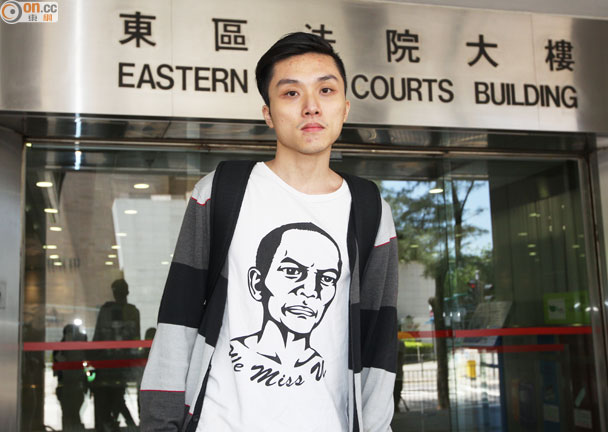
20-year-old Chinese University of
Hong Kong student of architecture and Neighbourhood and Worker's Service member
Yeung Ho-yin was charged with slapping and kicking a police officer, causing a
broken middle finger. According to police officer Cheung Kwun-man, about 2,000
demonstrators charged onto Lung Wo Road on the night of November 30. The
defendant Yeung Ho-yin suddenly slapped him on the lower right face. Therefore,
Cheung pulled Yeung from the crowd, pushed him onto the ground and sat on his
back. Cheung said that Yeung kept struggling and kicking him on the leg to cause
bleeding. Cheung said that any amount of slapping is a form of assault. The
defendant's lawyer accused the police officer reacted only because Yeung said to
him: "Do you have the time to flirt with girls?" The police officer disagreed
with the defense's assertion.
Another police officer Chen Man-chun
testified that when he took out the plastic cuff to help Cheung to subdue Yeung,
the defendant jerked the middle finger of his left hand. Chen said: If you can
rate pain on a scale of ten, this one was an eight." After Chen took his glove
off, he saw that the middle finger on this left hand was red and swollen, as
well as being unnaturally crooked.
(EJinsight)
August 26, 2015.
A
student neighborhood volunteer has had assault charges against him thrown
out by a Hong Kong magistrate’s court.
Magistrate Lee Siu-ho said there was insufficient evidence against Yeung
Ho-yin, a third-year architecture student at the Chinese
University of Hong Kong and a volunteer of the Neighborhood and Worker’s
Service Center.
Yeung
had been charged with assaulting two police officers during last year’s
democracy protests.
Cheung
Kwun-man, one of the plaintiffs, claimed he had made a report to a doctor
about his injuries. However, the doctor denied having received such a
report. Also, video evidence
showed Yeung was far back from a police line, not in front as described by
Cheung, during the alleged assault. A second plaintiff, Chan Man-chun, said
he sustained a sprain in a middle finger from the attack.
Lee accepted the defense argument that
Cheung could not have attacked the officers because they had pinned him to
the ground in the first place. And Chan wore protective gloves, so the
injury was unlikely, Lee said. Lee
described the officers’ testimony as “dubious”.
Yeung
later told reporters the verdict was “nothing to celebrate”, saying the
system is unjust and the case was a waste of taxpayers’ money.
The case stemmed from a Nov. 30, 2014 incident when dozens of protesters
crossed a police line in Admiralty.
The two
officers were part of a contingent on patrol at the protest site. Yeung was
among about 2,000 protesters.
Yeung
said he was immediately taken away and accused of assault by the policemen
after telling Cheung “there’s still time to flirt”.

(Wen
Wei Po) August 5, 2015.
20-year-old IVE student Chiu Kwok-hong
was charged with throwing a plastic bottle of water at Police Chief Inspector
Lee Shek-lun in Yuen Long, hitting Lee on the right leg and causing pain on
contact. In the company of family members, Chiu said that he saw the chief
inspector pulling the backpack of a female student, got upset and threw the
water bottle. He said that he was sorry afterwards, and he apologized to Lee and
his family. The magistrate sentenced Chiu to 80 hours of community service.

(Wen
Wei Po) August 7, 2015.
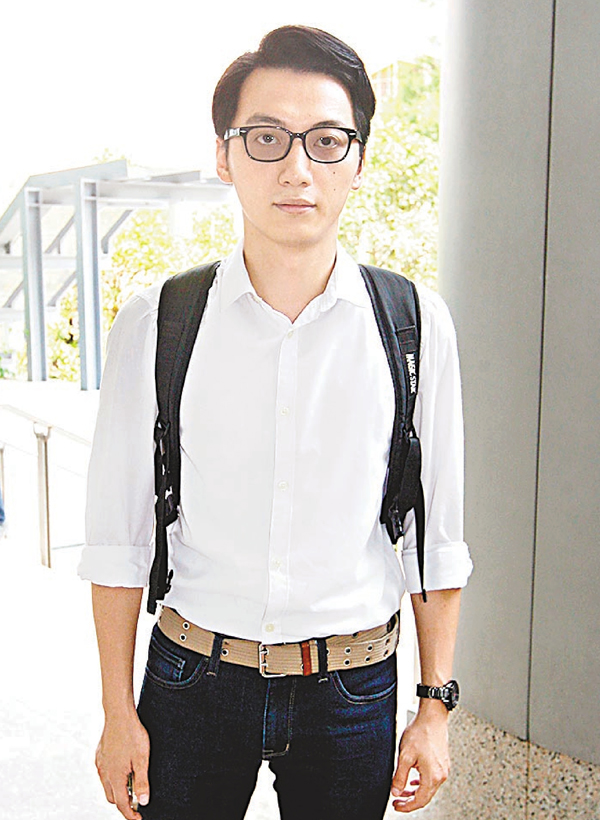
On December 25, 2014 during the
Shopping Revolution, 26-year-old Cheng Kam-mun ignored police warnings and
forcibly crossed the police cordon in order to cross the street. According to
the testimony of the police officer who made the arrest, he observed Cheng
ducking underneath the police tape to cross the street. He advised and warned
Cheng: "The road is closed! Get back on the sidewalk! Or else I will arrest you
for obstructing police duties!" Cheng kept walking while saying: "It's a
green light!"
The magistrate said that
Cheng's
crime was "not trivial." After watching the videotape, the magistrate
did not
believe that Cheng crossed the street because there was a green light.
After
all, Cheng had to duck under the police tape in order to get onto the
roadway.
Furthermore, Cheng changed his direction to bypass the policeman who was
trying
to stop him. There was no evidence that the police assaulted Cheng.
Cheng claimed to be hurrying to go home, but his home address of Peace
Avenue is
in the opposite direction of where he was walking towards.
The defense pleaded that the
defendant had to discontinue his studies in Australia because of this case.
Furthermore, this particular case was not the most serious among similar cases.
The magistrate found the defendant
guilty of the charge. The magistrate said that the defendant "was really being
ridiculous" and "making up excuses." The defendant was ordered to be held in
detention until the sentencing two weeks later.
(Commercial
Radio) August 20, 2015. Cheng Ka-mun was sentenced to 21 days in jail to
begin immediately.

(Wen
Wei Po) August 10, 2015.
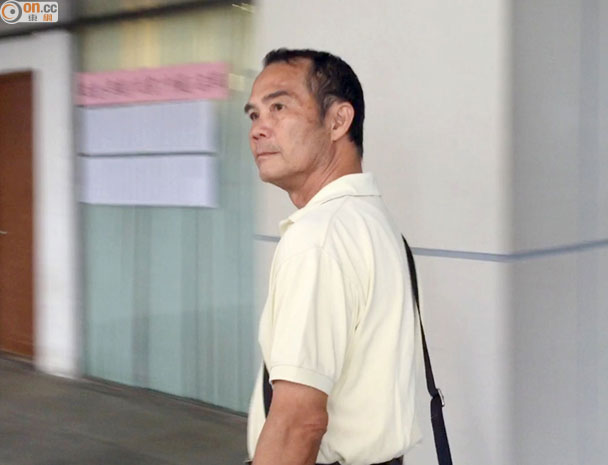
68-year-old Chan So is a retired
marine police officer. On October 3, 2014, he was at the the intersection of
Rodney Street and Queensway in Admiralty. Chan is being charged with touching a
female police sergeant on the breast. At the time, the female sergeant believed
that she was being sexually assaulted. So he grabbed Chan by the collar. Chan
turned around and fled. The female sergeant chased Chan down Rodney Street and
apprehended him at a temporary nursing station.
The magistrate said that the
female sergeant testified that she was off duty that day from the Commercial
Crime Bureau and saw a male colleague being surrounded by demonstrators. So she
went up to offer help when Chan assaulted her. However, the male sergeant
testified that he had not been surrounded and cursed out by demonstrators that
day, and that the defendant did not touch the female sergeant on the breast.
When the two testimonies differ so much, the benefit of doubt belongs to the
defendant. Therefore, the magistrate found the defendant not guilty.
However, the magistrate pointed
out that Chan declined to testify in court and presented only the police
interview video as evidence. The magistrate said that Chan's testimony was
dubious, and therefore made Chan pay for the court fees.

(Oriental
Daily) August 11, 2015.
49-year-old minibus driver Choi
Siu-lun said that he had zero income during the Occupy Central period and he
also owed $90,000 in gambling debts. So he agreed to smuggle drugs to Sydney for
his friend. On December 21, he and his wife went to Shenzhen when his friend
packed 2.2 kg of "ice" worth about $1 million on his waist and thigh. He
returned to Hong Kong and proceeded directly to the Hong Kong International
Airport. He was arrested in the immigration hall. Choi pleaded guilty to one
charge of drug smuggling and was sentenced to 17 years in jail.
Choi studied only as far as Third
Year in Middle School. He has a son with his ex-wife. His current wife is a
mental patient and therefore Choi is the sole economic support of his family.
The defense pleaded that he used to drive the minibus route between Kwun Tong
and Sai Wan, making $8,000 a month. During Occupy Central, his income dropped to
zero because the route was blocked. Nevertheless, he had to continue to pay for
the bus rental fees. His friend promised him to forgive his debt plus an
additional $80,000 afterwards. In the end, Choi never received that money.
The judge said that the maximum
sentence in such an international smuggle case is 26 years in jail. By pleading
guilty, Choi gets a sentence reduction of 1/3. The other conditions cited by the
defense resulted in another reduction of 4 years. Therefore, the final sentence
was 17 years in jail.

(Wen
Wei Po) August 11, 2015.
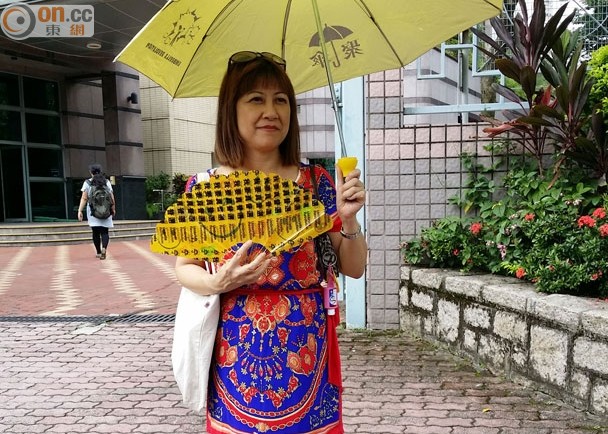
54-year-old League of Social
Democrats member Julie Li Sin-chi sat on the pedestrian sidewalk near the
intersection of Lung Wo Road and Tim Wah Road on October 15, 2014. She refused
to leave even after ordered by the police. The police arrested her and charged
her with obstruction of police duty. The magistrate pointed out that the police
were trying to restore order that day.
The magistrate said that the
police was trying to re-open Lung Wo Road for vehicular traffic that day.
Therefore, "one of the things that they had to do was to clear out the people
gathered in the area." Even though Li was on the sidewalk, she was still
obstructing police duty. Lee let her body go limp, so that two police officers
were needed to carry her away. Clearly her action made it harder for the police
to carry out their duties. Therefore the magistrate fined the defendant $2,500.
According to the defense, Li's
actions were milder compared to other forms of obstruction of police duty.
Furthermore, the defendant had no prior record and also has good character
(donating to or otherwise helping the Heep Hong Society, Pok Oi Hospital, etc).
Therefore, the defense wanted the magistrate to impose only a monetary fine.
Leung Kwok-hung said that the
sentence was "risible." He said that if a person can be found guilty for sitting
down and refusing to leave, then at least five hundred Shopping Revolutionaries
should be charged too. He criticized the magistrates for looking after the
prosecution's interests instead of the rights of the defendants.
Afterwards, Julie Li Sin-chi said
that she realized that she had done a lot of good things in her life according
to her lawyer. In this case, what she did on October 15 was also "a good thing."
(SCMP)
August 12, 2015.
A member of a pro-democracy group was fined
HK$2,500 on Tuesday for obstructing two policewomen on the night Civic Party
member Ken Tsang Kin-chiu was allegedly assaulted by seven police officers.
Although the League of Social Democrats' Julie Li Sin-chi, 54, did not
struggle when officers carried her away in Admiralty on October 15, Fanling
Court Magistrate Colin Wong Sze-cheung noted that the defendant deliberately
relaxed her body, forcing police to remove her. "This act clearly made it
more difficult for police to carry out their mission," Wong told Li, before
finding her guilty. Wong ordered Li, a clerk and an active fundraiser for
underprivileged groups, to pay the fine.
Li denied one count of obstructing a police
officer on the night in question. She refused to leave when two policewomen
told her three times to do so on Lung Wo Road near Tim Wa Road. Despite
convicting Li, the magistrate rejected the account given by the two
policewomen and refused to rely on the evidence they gave. They had told the
court they waited more than 10 seconds to act after warning Li. But a video
played by defence counsel Randy Shek showed they waited only five seconds.
Still, the video established that Li knew she had to leave yet did not, Wong
said.
Outside court, league lawmaker "Long Hair"
Leung Kwok-hung noted that Li's case arose on the same night as the alleged
assault on Tsang, which was caught on video and aired across Hong Kong.
Leung asked why the names of the seven policemen in Tsang's case had not yet
been made public.

(SCMP)
August 14, 2015.
Two Hong Kong activists have been convicted
for blocking doors at the legislature during a protest against the
government’s new-town development plans in June last year.
A magistrate said it was “common sense” for
anyone not to block doors, rejecting defence arguments that Cheung Hon-yin,
41, and Wong Kan-yuen, 25, did not get any warnings when they stopped two
doors at the Legislative Council’s west gate in Admiralty from closing on
June 6, 2014. “This is common sense. It would be inappropriate for any adult
to block other people’s doors, let alone the ones at Legco,” Eastern Court
magistrate Lee Siu-ho said this morning, before convicting the pair. Lee
also said Wong's attempt led to injuries suffered by security guards who
were there to handle the crowd.
Their co-defendant, Yip Po-lam, 34, was
guilty of remaining inside the Legco complex for more than five hours, Lee
ruled.
The trio were taking part in a protest
against development plans for the northeastern New Territories. Each had
denied one count of contravening an administrative instruction issued under
section 8(3) of the Legislative Council (Powers and Privileges) Ordinance.
They were found guilty of violating the
instruction, which banned visitors without permits or authorisation in the
premises while Legco meetings were ongoing.
Earlier, the court heard Cheung and Wong
stopped the doors from closing so protesters could enter the Legco lobby.
Yip remained inside the lobby for hours, during which she made two speeches
encouraging others to continue staging the protest inside the lawmaking
complex.
Lee slammed the duo’s acts for undermining
Legco’s system of issuing visitor permits. Yip should have keep to a
designated protest zone outside, the magistrate added. He adjourned
sentencing to August 28, pending reports on all three defendants.
Outside court, Yip, of the Land Justice
League, said they would continue to protest against the controversial
government plan both inside and outside Legco as lawmakers had failed to
listen to residents in the affected areas.
(Bastille
Post) August 14, 2015.
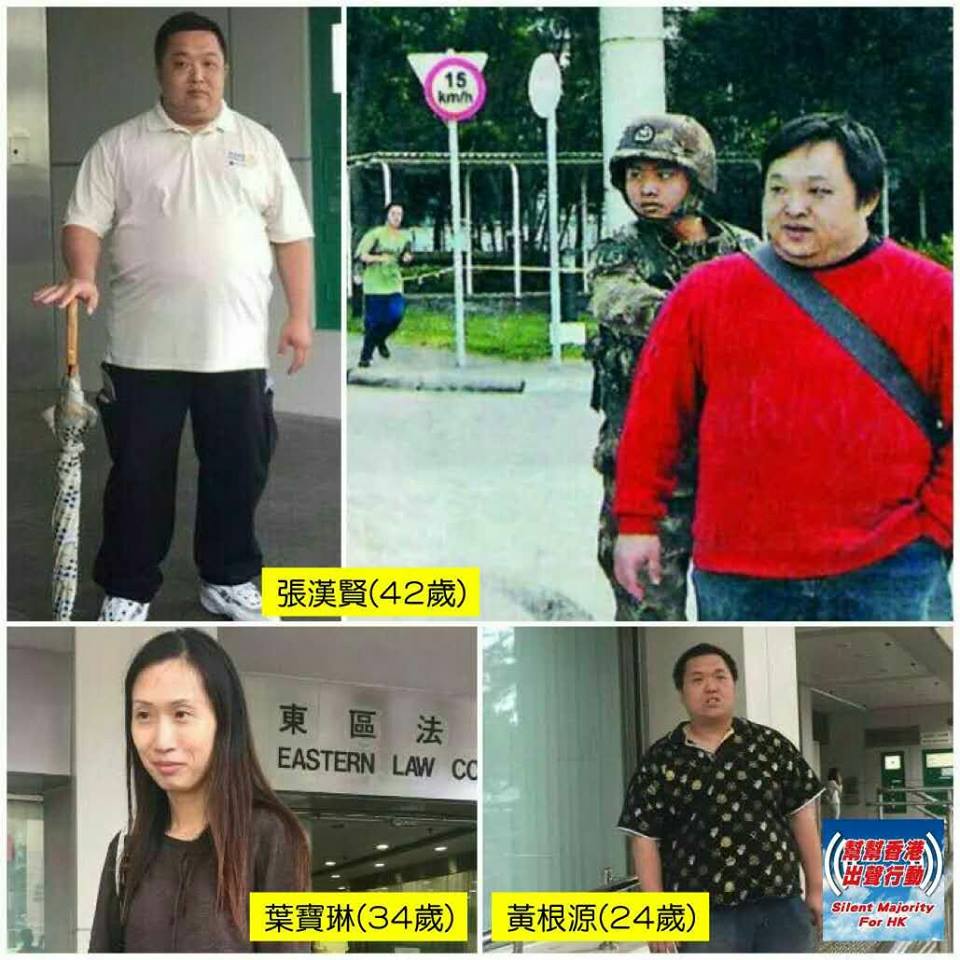
(Oriental
Daily) August 28, 2015.
The magistrate pointed out that the
defendants violated the visitor regulations at the Legislative Council.
While it is a good thing to be socially concerned, it is wrong to use
illegal methods even if the aims were noble. Such actions may get media
attention for a moment, but the public will merely notice the actions and
not the purposes.
The magistrate said that these three cases
were more serious than similar ones, and the probation officer's report
indicate that these individuals are not suitable for community service.
Therefore, the magistrate sentenced Yi Po-lam to two weeks in jail, Cheung
Hon-yin to one week in jail and Wong Kan-yuen to three weeks in jail.
Videos of the assault on the Legislative
Council:
Internet Comments:
- (Wen
Wei Po) August 15, 2015. 42-year-old Hong Kong Priority convener
Dickson Cheung Hon-yin grew up in Tai Po. Because he is obese, he claims
to have a heart condition that resulted in his heart operating only at 20%
of normal efficiency. Therefore, he cannot work and his family of five
lives off government welfare payments that amounted to close to $30,000
per month. Cheung also says that he is a full-time social activist. On
December 26, 2013, he and other Hong Kong Priority members held up the
British flag and intruded into the People's Liberation Army barracks in
Tamar. He was arrested, found guilty and fined $2,000.
- By the way, Cheung Hon-yin moved from immigrated from mainland China
around the time of the 1997 handover. He is a "Locust". Now he takes
welfare payments from the Hong Kong Special Administrative Region of the
People's Republic of China, and he runs "I am a Hongkonger, I am not
Chinese"?
- Fuck! It's always the same people. They
are the ones who barged into the People's Liberation Army barracks. They
are the ones who opposed developing North East New Territories. They are
the ones who charge into the Legislative Council. They are the ones who
ran Occupy Central. No matter what the government does, they will show up
and protest violently. Now that they have been found guilty, will they be
made to provide 80 hours of community service each? With people like
these (including the judges), how can Hong Kong not be in total chaos?

(Oriental
Daily) August 26, 2015.
18-year-old Form 5 student Law Cheuk-yung was
accused for participating in an unlawful assembly with unknown other
individuals on October 14, 2014. The prosecutor summoned a number of police
officers to testify. They said that the defendant was standing on the meridian
on Lung Wo Road. The defendant tossed four traffic cones onto the eastbound
car lane in order to block vehicular traffic. The defendant also spread his
hands to call other demonstrators to join him. One male and one female
uniformed officer took the defendant away. On the way out, they were attacked
by other demonstrators using arms and umbrellas. Another plainclothes
policeman went up to assist his uniformed colleagues, and fell down on the
ground. The police ultimately used pepper spray to disperse the crowd and took
the defendant away.
The defense played a video that showed that
the defendant did not struggle or resist. He only held up his hands high.
Other demonstrators rushed up and shouted: "Organized crime! Release him!"
The defendant chose not to defend himself. No
witnesses were summoned on behalf of the defense. The magistrate determined
that the evidence exists to find the defendant guilty. In summation, the
defense said that there was no evidence of any degree of violence by the
defendant. Nothing he did was provocative or intimidating, and his actions did
not disturb the social peace. Furthermore, the witnesses for the prosecution
only saw one person tossing traffic cones, so this was an individual activity
and not a mass action. Therefore the charge of unlawful assembly should be
dismissed.
(Oriental
Daily) September 2, 2015.
Today, the magistrate changed the charge from
unlawful assembly to public disorderly conduct in spite of the objections of
the prosecution. The magistrate said that he accepted the fact that the
defendant tossed a traffic cone from the meridian to cause vehicles to come
to a sudden stop. Afterwards, the defendant made hand gestures for other
demonstrators to come onto the roadway. Therefore the defendant has disturbed
public order, because his action could have caused damage to persons or
properties. His actions also provide the example for others to follow suit.
Thus, social order was disturbed. The magistrate also said that a driver
lowered his window to curse the defendant. Therefore, the defendant has caused
other people to become violent.
The defense pleaded that the defendant was
still in Form Six and preparing for his DGSE exams. His class master has
written a letter full of positive comments, such as the defendant was the
class monitor and also selected for leadership training.
Sentencing will take place on September 23,
2015 pending probation reports.
Internet comments:
- The Battle of Lung Wo Road occurred because
Hong Kong Baptist University Department of Social Work lecturer Shiu Ka-chun
released false information and told everybody by the Admiralty grandstand that
the police had just fired teargas and therefore everybody should immediately
rush over to Lung Wo Road. Shiu Ka-chun said that he was ready to die (see
SCMP). Law Cheuk-yung does not have to die. He will at most do some
jail time. Meanwhile Shiu Ka-chun is alive and well.
- (Economic
Times)
Daughter of Alan Leong to Perform in Hamlet
of Shakespeare’s Globe, Arriving in Hong Kong in September 2015.
“All the world’s a stage!”, Shakespeare’s
Globe started the tour of Hamlet to celebrate the 450th birthday of
Shakespeare, the 12 performers are indeed international, including the
daughter of Civic Party's Alan Leong (a member of the Legislative Council in
Hong Kong), they will be in Hong Kong in September for 5 shows. Hamlet is one
of the best known plays of Shakespeare, and this is the 3rd drama to come to
Hong Kong by Shakespeare’s Globe.
There is a Hong Kong representative this
time, Jennifer Leong (age 26), she has informed her family and friends in Hong
Kong. This is the first time she formally participated in the show of the
Globe, “I feel so lucky to be part of this 2-years tour!”
The role of Hamlet would be shifted between
Ladi Emeruwa and Naeem Hayat, other people would shift to play 2 or 3 roles.
Jennifer will be Ophelia, as well as another 2 male roles, Horatio and
Rosencrantz. She talks about the 3 roles. “I remember when I was performing in
the capital of Kenya, a schoolmate that I haven’t met for 7 years was there in
the audience; also the Caribbean area is so beautiful. It is one year to go
for this project, of course I would hope to have other future opportunities of
being a professional performer.”
While Jennifer Leong goes on a global
Shakespeare tour, Law Cheuk-yung is probably going to jail. So let us all
greet Jennifer Leong with opened yellow umbrellas when her show starts.
-
Cap 245 S18 Unlawful assembly:
(1) When 3 or more persons, assembled
together, conduct themselves in a disorderly, intimidating, insulting or
provocative manner intended or likely to cause any person reasonably to
fear that the persons so assembled will commit a breach of the peace, or
will by such conduct provoke other persons to commit a breach of the
peace, they are an unlawful assembly. (Amended 31 of 1970 s. 11)
(2) It is immaterial that the original
assembly was lawful if being assembled, they conduct themselves in such a
manner as aforesaid.
(3) Any person who takes part in an
assembly which is an unlawful assembly by virtue of subsection (1) shall
be guilty of the offence of unlawful assembly and shall be liable-
(Amended 31 of 1970 s. 11)
(a) on conviction on indictment, to
imprisonment for 5 years; and
(b) on summary conviction, to a fine at level 2 and to imprisonment for
3 years.
Was this an unlawful assembly? See
Passion Times for the record. There were more than 3 persons. They
were assembled together. They conducted themselves in a disorderly,
intimidating, insulting and provocative manner. They caused a breach of the
peace. Therefore they are an unlawful assembly.
- Coming out for the trial today, he looks
solemn and proper for the Apple Daily reporter.
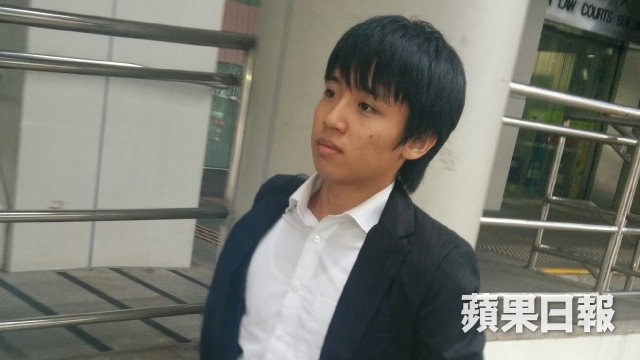
When a reporter from another newspaper tries
to take photos on another occasion (see
Oriental Daily), he is a screaming ("You better not fucking take
photos!") maniac. This is typical Yellow Ribbon bipolar disorder.
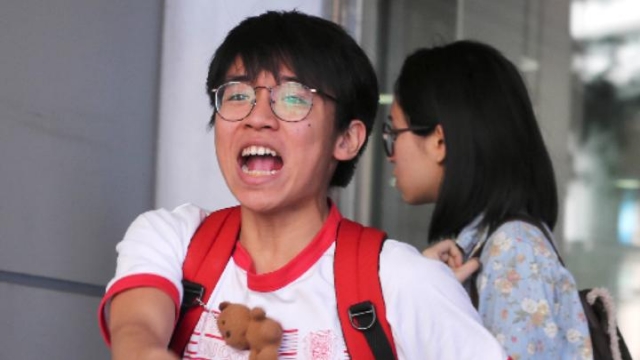
- From Hong Kong film director Wong Jing:
"One after another, those who assaulted the police during Occupy Central were
taken to court and sent to jail or sentenced to community service! Upon
careful analysis, there are only two types of persons: students and unemployed
persons! This showed just what the pan-democrats and Jimmy "Fat Guy" Lai have
wrought! They deceived those who are not strong on analytical ability, as well
as those long-term unemployed/unemployable individuals who hate society.
However, none of their own children even participated. They only deceive other
people's children to die. They are so selfish! If you trust Jimmy Lai, even
female pigs can climb up trees!
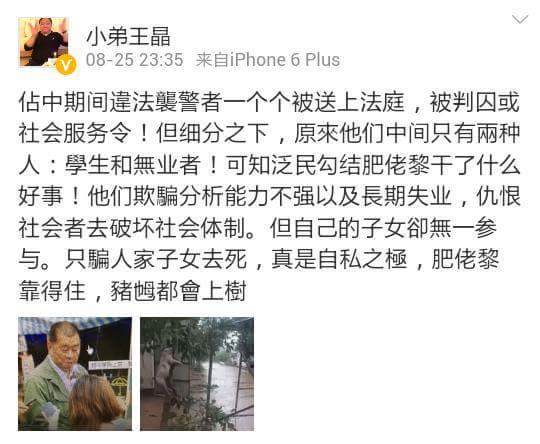

(SCMP)
How Hong Kong got under the skin of United States Consul General Clifford Hart.
August 10, 2015.
Clifford Hart has been America's top man in
Hong Kong since 2013 and is perhaps the best-known and most-talked-about
diplomat in this otherwise locally-focused society.
What is less well known about the
influential envoy, however, is that the same city was where he stopped over
on his trans-Pacific journey to his first ever diplomatic posting in
Guangzhou nearly three decades earlier.
"When I came through here in 1984, Hong
Kong got under my skin almost immediately," Hart told the South China
Morning Post in an interview conducted at his residence on The Peak. "I
have had a deep abiding interest in Hong Kong ever since then."
While he had been assigned all over the
world, from Baghdad to Beijing, from the Soviet Union to his home country,
"I would still be reading about Hong Kong and following it closely", said
Hart, whose most recent appointment was as US special envoy to the six-party
talks on North Korea's nuclear programme.
Asia has always been in the family blood.
Hart's grandfather was a US navy officer and a slave labourer in a Hitachi
prisoner-of-war camp in Tokyo during the second world war.
Hart will be bidding farewell to Asia next
year, but he shows no eagerness for a retiree's life yet.
"There is always the possibility that I'll
stay in the diplomatic service - the State Department can always surprise
you.
"It will be 33 years next year when I leave
here. That's a good time. This is a very satisfying and I think reasonably
successful career," he said.
Or, he might move to the private sector,
"whether it's based in Asia or back in the United States - I'm really quite
flexible".
One of the issues that he hopes to focus on
before he leaves is to follow up on the State Department's report on human
trafficking, which gives Hong Kong a damning tier 2 ranking, putting it on
par with Ethiopia and the like and suggesting the government was not being
responsive enough.
"Hong Kong would be unusual if it didn't
have a problem, not if it did," he said in response, again calling on the
government to devise an anti-trafficking law.
But on other areas the government should
focus on, he shied away from specifics, saying: "I am a US diplomat and I am
not an economist or long-term economic strategist."
He is also a cook, though, one that
specialises in Sichuan cuisine.
"I have very few frustrations here in Hong
Kong, but one of them is I don't cook [because] I have a professional chef,"
he said. "The kitchen in this residence is really his field of battle."
The battlefield could as well be online.
Hart is most likely the highest-profile diplomat by posting selfies on the
consulate's social media page wherever he goes.
"I never came with a strategy to use
Facebook," he said, commenting on posts that earn him such fancy reactions
as "Welcome, the 29th Governor of Hong Kong".
But apart from the "powerful" modern
technology through which he is "pretty often" recognised by passers-by, Hart
equally appreciates the traditional Chinese culture here.
To Hart, Chinese culture is preserved
better here than on the mainland. "It's recovering on the mainland … but it
will take a long time to recover, whereas [in] Hong Kong it's just intact,"
he said.
Asked what he would miss most in Hong Kong
following his departure, the unprepared Hart giggled. "Oh my gosh. Again,
very hard to answer that in one single thing."
Finally, he did find one thing he would
miss.
"My greatest pleasure is walking through
neighbourhoods [and] watching people live their lives. I find the southern
Chinese urban life really interesting," he said. "You have people who are
indisputably part of the 5,000-year tradition of Chinese culture living in a
first-world place with rule of law and transparent government. I will miss
that daily exposure to China through Hong Kong when I leave here.
"It is the one true first-world part of the
People's Republic of China."
(SCMP)
August 10, 2015.
The top US representative in Hong Kong has
called on the city to return to the "pragmatic and moderate mainstream" path
and work towards the goal of achieving full democracy.
Clifford Hart, US consul general to Hong
Kong and Macau, said the rights guaranteed to Hongkongers under the "one
country, two systems" principle had remained strong since the handover and
rejected the suggestion that the city had become ungovernable.
Hart was speaking to the South China
Morning Post in a wide-ranging interview - the first of a series with
Hong Kong-based diplomats.
The veteran diplomat said the 1½-year
debate on Hong Kong's electoral reform had been "bruising" and had polarised
the city.
"I think you hear a limited number of
extreme voices at both ends of the political spectrum. I don't think that's
Hong Kong's real personality," he said.
"I think Hong Kong tends towards pragmatic
and moderate mainstream. So the most important thing for Hong Kong to do
right now is to go back to those hallmark qualities that Hong Kong has.
"Put up your dialogue across the political
spectrum. There are different views here and it's entirely healthy. You
would expect there to be different views on how Hong Kong should be
governed," he said. "The question is: how are the differences resolved in
the interest of Hong Kong people?"
Hart, who assumed his Hong Kong post in
July 2013, noted that the city was facing a lot of challenges, and the
debate on universal suffrage was just one of them.
He dismissed speculation among certain
quarters in the pro-establishment camp that the US consulate in Hong Kong
had been recruiting more staff and was home to more than 1,000 employees.
"This is absurd, nonsense, downright silly.
I mean it can't be taken seriously. Someone even suggested there are
thousands of people in the consulate in Hong Kong. In fact the Hong Kong
government knows exactly - exactly how many US diplomats are here because
they provide our credentials.
"There are no more than 140. It's
consistent with our work in a whole range of areas here," Hart said, citing
strong ties between Hong Kong and his country in the areas of commerce and
culture.
Hart acknowledged that Hong Kong enjoyed a
range of guaranteed rights for its citizens. "These are important to its
prosperity and brilliant success. I think we see right now Hong Kong is
still quite strong," he said.
He also rejected the notion of the city
becoming ungovernable. "Like I often tell my friends, I wish every
ungovernable place were as well-governed as Hong Kong is," he said. "There
is effective rule of law, an open society and transparent government."
Asked if the Hong Kong government's refusal
to detain whistle-blower Edward Snowden in 2013 had any negative impact on
the discussion on the waiver of US visa requirements for Hongkongers, the US
consul general insisted the two issues were not connected.
"The underlying consideration is that the
way US law is written, visa waiver, once approved, can only be done so for a
sovereign state. Hong Kong is not a sovereign state," he said.
"I don't see that's going to be overcome
any time soon ... I don't see that happening any time soon. I would urge
[local people] to appreciate that there is no lack of respect for Hong
Kong."
Hong Kong has been lobbying the US
government for many years to be put on the visa waiver programme, which
allows travellers visa-free access for tourism or business in the US for up
to 90 days.
During his trip to the US in 2011, then
chief executive Donald Tsang Yam-kuen raised the issue with then US
secretary of state Hillary Clinton.
Tsang had said at the time that the US
government was positive about waiving visa requirements for Hongkongers.
Taiwanese residents were granted visa-free
access in 2012 under a special arrangement.
Despite his appreciation of the strengths
of Hong Kong, Hart called on the city to improve its copyright law, which he
described as "seriously outdated".
Internet comments:
- Clifford Hart is making it very clear
that Hongkongers will acquire visa-free status only if Hong Kong becomes an
independent sovereign country. Well, now we know what we need to do ...
- Yes, I know what you mean. We are going to occupy the American Consulate
on 25 Garden Road, Hong Kong Island and hold the place until the US
government concedes to our demands. We know that there are US marines
guarding the location. But we are the Valiant Warriors of the Hong Kong
City-State, and we will defeat those machine-gun-armed marines with our bare
hands.
- Thank God I don't use a Hong Kong SAR
passport. I have a BNO passport.
- Eh, you still need a visa to visit the United States with a BNO passport
(see
Wikipedia).
- A few years ago, my friend and I traveled to Europe. The Iceland volcano
spewed ashes and air traffic was halted for several days. My friend used a
BNO passport and he was restricted to stay inside the airport in Germany. I used a HK
SAR passport and I was free to go around town.
- The BNO passport will get you visa-free to Uranus (=Your Anus).
- Clearly Clifford Hart is saying that
Taiwan is a sovereign country. When will Taiwan declare itself to be a
sovereign country and apply for United Nations membership?
- The application for UN membership will be automatically vetoed by Security
Council permanent member China.
- The moment when Taiwan declares itself a sovereign country is when the
Chinese cruise missiles start raining down on Taiwan.
- The
relevant statement is this: With respect to all references to “country” or
“countries”, it should be noted that the Taiwan Relations Act of 1979, Pub.
L. No. 96-8, Section 4(b)(1), provides that “[w]henever the laws of the
United States refer or relate to foreign countries, nations, states,
governments, or similar entities, such terms shall include and such laws
shall apply with respect to Taiwan.” 22 U.S.C. § 3303(b)(1). Accordingly,
all references to “country” or “countries” in the Visa Waiver Program
authorizing legislation, Section 217 of the Immigration and Nationality Act,
8 U.S.C. 1187, are read to include Taiwan. This is consistent with the
United States’ one-China policy, under which the United States has
maintained unofficial relations with Taiwan since 1979.
- If Taiwan is a sovereign country, then how come the United States does not
maintain an embassy. In fact, the United States does not even have any
consulates in Taiwan. There is only the private, non-profit corporation
known as the American Institute of Taiwan to represent the United States.
- The problem is that the HK SAR government
hands out passport to all permanent residents. If they were more restrictive
and give passports only to high-quality, high-education and high-income Hong
Kong elites and not to poor-quality, poor-education and low-income bums,
there wouldn't be any visa requirements for Hongkongers to go anywhere in the world.
- The criterion for having a HK SAR passport is that the holder must be born
in Hong Kong. All foreign-born persons (with or with right of abode) should
not be allowed to hold HK SAR passports. This will make sure that
Hongkongers get respected all over the world.
- With respect to the preceding commentator, I guess that if some country
won't do so, will you "valiantly resist" them until they submit?
- Many mainlanders are getting HK SAR government passports, and that is why the United
States shouldn't give visa-free status to Hongkongers. Japan allows
Hongkongers to go there visa-free. That is wrong. Japan should rescind the
policy immediately until Hong Kong makes sure that mainlanders can't hold HK
SAR passports.
- History: (Christian
Science Monitor) August 7, 2015.
China and the Soviet Union, the two
largest communist nations, both could send growing numbers of emigrés to
the United States - but for opposite reasons. In the USSR, the new policy
of openness allows growing numbers of Soviets to seek a fresh start in the
US. In China, repression is driving people toward the West.
Currently, the Chinese emigr'e focus is
on Hong Kong, which reverts to Chinese rule in 1997 under a treaty with
Great Britain. China's recent military repression of the student democracy
movement sent shivers through Hong Kong - population 3.4 million.
The United States accepts up to 5,000
Hong Kong citizens as immigrants each year. One bill now moving through
Congress would double that. But Rep. John Porter (R) of Illinois doesn't
think that measure goes far enough, and has introduced legislation that
would increase Hong Kong's quota to 50,000 a year.
According to a Porter aide, the bill has
three purposes:
1. Send China a message: If Chinese
repression continues, the US will provide a safety valve to let people
out. The result would be a ``brain drain'' that would leave little for the
Chinese to take over.
2. Send Britain a message. If the United
Kingdom won't allow Hong Kong residents to emigrate to Britain, even
though they carry British passports, then the UK should at least lead a
Western effort to save the people of the colony.
3. Send Hong Kong a message. If no one
else will help, ``the US should welcome them because they are exactly the
kind of people we want, people with an understanding of capitalism and
great entrepreneurial ability.''
The Porter aide, who asked not to be
identified, says fears that 3.4 million Chinese from Hong Kong would swamp
London are groundless. It is estimated that about 6 percent, or just over
200,000 people, would migrate to Britain if they were free to do so, the
aide says.
Presently about 45,000 people a year
leave Hong Kong. Most go to Singapore, Canada, Australia, and the US.
The aide says Mr. Porter feels Asian
immigrants are making important contributions to America. So would the
people of Hong Kong, he says.
''This is an historic and unique
situation,'' the aide contends. "Porter says these people deserve special
status. They would not be a burden on our economy. And they should fit in
here because they have already been acclimated to British-type society."
- (Local
Press) Wan Chin's response to Clifford Hart: Parliamentary Cabinet
is Pragmatic, Moderate Mainstream Democracy. August 12, 2015.
Translated by Chapman Chen.
In an interview given to the South China
Morning Post on 10 August, Clifford Hart, US consul general to Hong Kong
and Macau, called on the city to return to the “pragmatic and moderate
mainstream" path and work towards the target of achieving full democracy.
In commenting on Hong Kong’s political situation, Clifford said the rights
guaranteed to Hongkongers under the “one country, two systems" principle
had remained solid since 1997 and rejected the suggestion that the city
had become ungovernable.
He thought that rule of law was still
valid in Hong Kong, that Hong Kong was an open society and its government
was transparent. He also pointed out that Hong Kong needed to take a
pragmatic, moderate mainstream path in order to attain full democracy.
On 11 August, on his facebook wall, the
Hong Kong scholar, Dr. Wan Chin responded to Clifford’s saying by
asserting, “The Legislative Council shall be elected by universal suffrage
as scheduled in 2020, after which the legislators shall nominate Chief
Executive candidates and then put them to the vote. This moderate proposal
of legislators nominating Chief Executive candidates has been covertly
endorsed by US consul general.”
In an exclusive telephone interview given
to Local Press, Wan Chin explained that the so-called pragmatic and
moderate mainstream path precisely referred to parliamentary nomination,
the mainstream election system practiced in most European countries. The
civic nomination system proposed by the pan-democracy camp is not the
mainstream amongst democratic countries all over the world; and civic
nomination may just serve as a specimen or a remedial system.
Not a single political party in Hong Kong
has put forth the parliamentary cabinet system; they all run towards
different extremes. Actually, the nomination committee required in the
Basic Law may be interpreted as the entire Legislative Council.
In the Hong Kong City-State Summit II
held on 29 July, apart from recommending the parliamentary nomination
system, Wan Chin also stressed that “In the all-round direct election of
Legco, the elected legislators got to give up any foreign nationality. And
the legislators, by way of internal consultation, shall nominate from
among themselves Chief Executive nominates and then put them to the vote.”
As pointed out by Wan Chin, parliamentary
nomination coupled with the regulation that elected legislators have to
renounce their foreign nationalities, will help to solve the two major
current problems of Hong Kong:- the ruling regime’s failure to govern and
unclearness of loyalty of Hong Kong residents. It will enable local
interests to be properly taken care of and make the absentee middle class
and the rich and the powerful in Hong Kong to return to the local.
Most importantly, Hong Kong will be
returned to the hands of the local people and will no longer just serve
the interest of Communist China, America, or any other foreign countries.
When Hong Kong returns to the right path, it will also become a model of
Orthodox Chinese culture, which in turn will contribute to the rise of an
Orthodox Chinese Confederate.
Internet comments:
- At least Wan Chin dared to go where
Clifford Hart didn't -- he pointed out that "the civil nomination system
proposed by the pan-democracy camp is not in the mainstream amongst
democratic countries all over the world." That is to say, the
pan-democrats wanted civil nomination because it is an "international
standard" when in fact such a system is not used in the United States,
United Kingdom, France, Germany, Australia, New Zealand, Japan and all
other major countries except Russia. Clifford Hart did not care to mention
this small detail.
- So Wan Chin wants the Legislative
Council members to nominate Chief Executive candidates from among
themselves (and only from among themselves). This means the last three
Chief Executives (Tung Chee-hwa, Donald Tsang, CY Leung) are ineligible
under this system. Tung's background as a businessman with mainland
connections, Donald Tsang's background as Chief Secretary of the Hong Kong
SAR Government and the British colonial administration, and CY Leung's background as Executive Council member are
apparently all useless. Instead, the only requirement for Chief Executive
is being a current member of the Legislative Council.
Will the people of Hong Kong be satisfied
with these choices? The last time that Hong Kong University Public Opinion
Programme asked about satisfaction with the Legislative Council members,
they found (see
Data):
December 2011
16.9%: Positive
28.0%: Half-half
48.7%: Negative
6.4%: Don't know/hard to say
That 16.9% would be delighted, but the
48.7% would not be amused.
That data came from 2011. Today, we
expect the numbers to be much worse after the debacle of Occupy Central
for the pan-democratic camp and the Constitutional Reform vote for the
pro-establishment camp.
The point of civil nomination is that
practically anyone who wants to run for Chief Executive can do so. Wan
Chin is proposing an even more restrictive system than the government's
proposal that was vetoed by the pan-democrats. Wan Chin's proposal will be
rejected by both camps.
- Here is a YouTube video
https://www.youtube.com/watch?v=fp9IkCrVXXQ in which someone has made a
cartoon off Wan Chin's demonstration in Mong Kok on how to wield a shield that
was made out of a suitcase to vanquish the Hong Kong Police and the
People's Liberation Army.
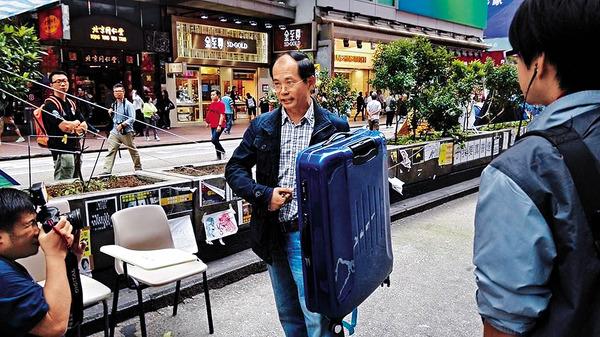
Such behavior is not 'pragmatic, moderate mainstream.'
- Wan Chin says: "Actually,
the nomination committee required in the Basic Law may be interpreted as the
entire Legislative Council."
Basic Law Article 45
The Chief Executive of the Hong Kong Special
Administrative Region shall be selected by election or through consultations
held locally and be appointed by the Central People's Government.
The method for selecting the Chief Executive shall be specified in the light
of the actual situation in the Hong Kong Special Administrative Region and
in accordance with the principle of gradual and orderly progress. The
ultimate aim is the selection of the Chief Executive by universal suffrage
upon nomination by a broadly representative nominating committee in
accordance with democratic procedures.
The specific method for selecting the Chief Executive is prescribed in Annex
I: "Method for the Selection of the Chief Executive of the Hong Kong Special
Administrative Region".
Basic Law Annex I
1. The Chief Executive shall be elected by a broadly
representative Election Committee in accordance with this Law and
appointed by the Central People's Government.
#2. The Election Committee shall be composed of 800
members from the following sectors:
| Industrial,
commercial and financial sectors |
|
200 |
| The professions
|
 |
200 |
| Labour, social
services, religious and other sectors |
 |
200 |
| Members of the
Legislative Council, representatives of district-based
organizations, Hong Kong deputies to the National People's
Congress, and representatives of Hong Kong members of the National
Committee of the Chinese People's Political Consultative
Conference |
  |
200 |
The term of office of the Election Committee shall be five years.
3. The delimitation of the various sectors, the
organizations in each sector eligible to return Election Committee
members and the number of such members returned by each of these
organizations shall be prescribed by an electoral law enacted by the
Hong Kong Special Administrative Region in accordance with the
principles of democracy and openness.
Corporate bodies in various sectors shall, on their
own, elect members to the Election Committee, in accordance with the
number of seats allocated and the election method as prescribed by the
electoral law.
Members of the Election Committee shall vote in
their individual capacities.
#4. Candidates for the office of Chief Executive may
be nominated jointly by not less than 100 members of the Election
Committee. Each member may nominate only one candidate.
5. The Election Committee shall, on the basis of the
list of nominees, elect the Chief Executive designate by secret ballot
on a one-person-one-vote basis. The specific election method shall be
prescribed by the electoral law.
6. The first Chief Executive shall be selected in
accordance with the Decision of the National People's Congress of the
People's Republic of China on the Method for the Formation of the
First Government and the First Legislative Council of the Hong Kong
Special Administrative Region.
*7. If there is a need to amend the method for
selecting the Chief Executives for the terms subsequent to the year
2007, such amendments must be made with the endorsement of a
two-thirds majority of all the members of the Legislative Council and
the consent of the Chief Executive, and they shall be reported to the
Standing Committee of the National People's Congress for approval.
If Wan Chin wants to change the Basic Law so that the
Legislative Council becomes the Nomination Committee, he will have to
amend the Basic Law, for which he needs "the endorsement of a two-thirds
majority of all the members of the Legislative Council and the consent of
the Chief Executive, and the amendment shall be reported to the Standing
Committee of the National People's Congress for approval."
How is that going to happen? More Occupy Central? More
Valiant Resistance?
- Wan Chin also wants universal suffrage for the
Legislative Council in 2020. That requires an amendment of the Basic Law
according to
Article 159.
The power of amendment of this Law shall be vested in
the National People's Congress.
The power to propose bills for amendments to this Law shall be vested in
the Standing Committee of the National People's Congress, the State
Council and the Hong Kong Special Administrative Region. Amendment bills
from the Hong Kong Special Administrative Region shall be submitted to
the National People's Congress by the delegation of the Region to the
National People's Congress after obtaining the consent of two-thirds of
the deputies of the Region to the National People's Congress, two-thirds
of all the members of the Legislative Council of the Region, and the
Chief Executive of the Region.
Before a bill for amendment to this Law is put on the agenda of the
National People's Congress, the Committee for the Basic Law of the Hong
Kong Special Administrative Region shall study it and submit its views.
No amendment to this Law shall contravene the established basic policies
of the People's Republic of China regarding Hong Kong.
So how is that amendment going to happen, such that "Most
importantly, Hong Kong will be returned to the hands of the local people
and will no longer just serve the interest of Communist China, America, or
any other foreign countries. When Hong Kong returns to the right path, it
will also become a model of Orthodox Chinese culture, which in turn will
contribute to the rise of an Orthodox Chinese Confederate."? Why would
Communist China be interested in amending the Basic Law in this manner?
(Medium)
The next phase of the democracy movement: A referendum on constitutional
reform and sustainable democratic self-governance, By Joshua Wong. August
19, 2015.
This essay was originally published in Chinese in
Ming Pao (now paywalled) on August 2, 2015. The original can also be
viewed on HK Dash. The English translation below is by Lucas Tse, Lewis Ho
and Kong Tsung-gan.
Joshua Wong is one of the most prominent leaders of
the HK democracy movement. In this essay, he describes his vision for the
way forward for the movement after it defeated the fake universal suffrage
proposal of the Communist Party and HK government in June. Some background
and context for the essay can be found in this Hong Kong Free Press
article. Notes are provided alongside the article to explain key terms. A
commentary can be found here.
— KTG
If we hope to continue along the path of democratic
self-governance in Hong Kong and successfully address the “second question
of the future” , we must show the will and vision for sustainable
self-governance in this age of democratic bankruptcy. Our goal in
struggling for self-governance is self-determination, which means that the
Hong Kong people have the right to decide Hong Kong’s future, and which
also establishes a Hong Kong subjectivity.
In this post-reform period, while the localists have not
gained mainstream support, they have put forward an agenda for
self-governance or independence and provided a solution to the democracy
movement in Hong Kong. The pan-democrats ought to understand that a
‘democratic return to Chinese sovereignty’ is futile, and that endless
campaigning for universal suffrage in 2022 is unpersuasive. Yet they have
neither offered a new agenda to replace the ‘democratic return to Chinese
sovereignty’, nor established short-, medium- or long-term goals for the
movement.
Young scholars have suggested constitutional reform.
Raphael Wong (黃浩銘) of the League of Social Democrats has suggested the
formation of an assembly for constitutional reform. Wong Ching-Fung (王澄鋒)
of the Hong Kong Federation of Students has suggested a committee for
electoral reform, largely in line with the proposals for constitutional
amendment and a referendum for a new Basic Law put forth by Raymond Wong
(黃毓民) two years ago. In spite of that, though the Democratic Party listed
amendments to the Basic Law and abolition of ‘ballot by group’ in its
platform as long as 15 years ago, Emily Lau (劉慧卿) now says that the
pan-democrats have not had sufficient discussion of the question of
amending the Basic Law.
Still, the immaturity of the movement for constitutional
reform ought not be entirely blamed on the self-defeating antics of the
political parties. The fundamental problem is that the demand for reform
has no foundation. Ordinary people likely do not understand that
constitutional reform means amending the Basic Law, and that amending the
Basic Law requires the formation of an implausible committee. The people
have not recovered from the Occupy movement. In light of that, immediately
pushing the democracy movement into the next phase of forming a reform
committee and holding a referendum to reclaim the right to constitutional
reform without any transition period is likely to confuse and marginalize
the people. For that reason, while constitutional reform can be a
long-term objective, it is not a viable mainstream political objective
now.
Struggle is impossible without an agenda
In his essay “What kind of unity do we need?” Kevin Yam
(任建峰) of the Progressive Lawyers Group writes that there is no need to
discuss the large ideals, which he believes is ineffective or even
detrimental to garnering public support. He suggests acting on more urgent
issues, such as opposing the pro-Beijing camp in the Election Committee.
Scholar Brian Fong’s (方志恆) Theory of Hong Kong Reform makes broader
proposals such as responding to the challenges of the times and awakening
the free spirit of the city, believing that Hong Kong needs a new local
democracy movement rooted in civil society. He further points out that
professional and social organizations, universities, schools, and public
and private sectors are all battlegrounds for the defense of Hong Kong
values.
And yet, whether it’s Brian Fong’s vocabulary of local
citizen organizations and society besieging government or Kevin Yam’s
belief that the urgent task is to retain the existing seats in the
Legislative Council (Legco) and the Election Committee, the underlying
thinking is the “fight for each inch” of the past 30 years; that is to
say, the hope to effect qualitative change via quantitative change in
various spheres of discourse and politics, which are seen as leverage that
can be used against Beijing. Even though the pan-democrats seem to be at a
loss, they have done work to increase quantitative leverage in such areas
as Kwai Tsing and Sham Shui Po and professions such as education and law.
The democratic, localist and pro-Beijing camps have all done substantial
work in many sectors. They differ merely in ideology, holding to the hope,
respectively, for democratic, separatist and patriotic politics. Thus,
“fighting for each inch” is far from a novel suggestion.
Struggle is necessary, but those participating in a
democracy movement cannot confuse method and aim. In “Society must face
the real and actual politics”, Professor Lui Tai-Lok (呂大樂) writes, “How
should the movement continue? Theoretically this ought to be the hottest
topic, but most conversations lack precision. What you have is politically
correct fluff … They say over and over again ‘persevere’, but few discuss
how they are going to persevere. Persevere on what grounds? Persevere and
do what work?” This is an incisive criticism of our friends who avoid
thinking about an agenda for the future.
Many of our friends continue to repeat “I want real
universal suffrage” without revising their strategy to avoid endless
argument over political reform. It is therefore unsurprising that the
number of people on the streets has not swayed those in power. Any
movement for democracy is a long-term struggle. Yet many retain the
threadbare fixation on gaining seats in Legco or the Election Committee or
champion joining hands with civil society as if they have discovered the
New World. Empty “anti-red” and “core values” rhetoric is ultimately
unable to identify the concrete goals of political struggle. To persevere
for the sake of persevering does not help those who have experienced the
disappointment of Occupy. That is why democrats must return to the
original point and revisit the big debates in order to move towards five-,
10-, 15-year visions for constitutional reform. Only then can civil
society be liberated from its disempowerment.
The motivation for democracy is self-governance in Hong
Kong
In the 1990s, the three large parties (Democratic Party,
DAB, Liberal Party) all officially supported the realization of universal
suffrage for the Chief Executive election in 2007 and Legco election in
2008. To request Beijing’s action in compliance with the Basic Law, Martin
Lee (李柱銘), Jasper Tsang (曾鈺成) and Allen Lee (李鵬飛) even believed that the
three parties could rotate in governance. Yet in 2004, the Communist Party
postponed the introduction of universal suffrage, which caused the DAB to
alter its stance and support double universal suffrage in 2012. The
Democratic Party was pressured to support initiatives outside of the
purview of the Basic Law, including the five-district referendum, civil
disobedience, civil nomination and constitutional reform.
If Beijing had not welched in 2004 and had allowed
universal suffrage in 2007 according to the principle of ‘a democratic
return to Chinese sovereignty’, perhaps today’s radicals would not be so
rapidly proliferating on the internet, perhaps a large-scale Occupy
movement would not have emerged, and perhaps the various political parties
may even have beneficial interactions with Beijing. The recent burgeoning
of localist discourse is largely the result of young people’s reaction to
the authoritarian politics of the Chinese Communist Party and their belief
that Hong Kong cannot practice self-governance under the rule of China.
Thus, Beijing’s noncompliance in 2004 has been the catalyst for the
tendencies among young people towards independence and separatism.
In other words, the demands of the democratic camp were
originally very modest. There was no demand for Hong Kong independence,
only the desire to practice self-governance in all matters outside of
national security, largely in line with what Hong Kong University students
wrote in a letter to Premier Zhao Ziyang in 1984: “Maintain the principle
of democratic self-governance in Hong Kong; China will abstain from
interfering in Hong Kong’s internal affairs; and the future Chief
Executive will be elected by Hong Kong citizens according to the principle
of universal suffrage.”
Deciding the future is necessary for sustainable
self-governance
What the democrats have learned in this period of
political reform is that facilitating mutual trust with Beijing is an
unrequited desire, that implementing universal suffrage according to the
existing framework for political reform is a pipe dream, and that the
regime’s policy on Hong Kong is changing. “One country” is interpreted as
primary to “two systems”; a high-level of autonomy is equated with Beijing
retaining control of governance at all levels; the separation of powers
misunderstood as the collusion of powers. This all demonstrates that Hong
Kong faces the grave possibility of becoming no different from Shenzhen.
Even if the Basic Law remains unchanged for 50 years, the future is
entirely unknown beyond 2047. Nobody can promise that “one country, two
systems” will not become “one country, one system” or that the Special
Administrative Region will not become a directly controlled municipality.
If we hope to continue along the path of democratic
self-governance in Hong Kong and successfully address the “second question
of the future”, we must show the will and vision for sustainable
self-governance in this age of democratic bankruptcy. Our goal in
struggling for self-governance is self-determination, which means that the
Hong Kong people have the right to decide Hong Kong’s future, and which
also establishes a Hong Kong subjectivity.
Unless we are willing to accept that, 32 years from now,
Hong Kong’s sovereignty, political status and constitution have no popular
support and that an independent judiciary and freedom of speech may
disappear, those seeking democracy have no other path than to practice
self-governance by deciding the future for ourselves. Even if “One
Country, Two Systems” continues after 2047, the authoritarian Chinese
regime is sure to implement the version described in the White Paper and
jettison Zhao Ziyang’s response to the students 30 years ago, “democratic
self-governance in Hong Kong is wholly reasonable.”
Self-determination begins with a referendum and
constitutional reform
It is admittedly unrealistic to expect the achievement
of self-determination within the next stages of the democracy movement.
But if the people of Hong Kong are to be prepared to confront the ‘second
question of the future’ by around 2030, we must, setting
self-determination and the continuation of autonomy as our ultimate goals,
work backward to the starting point, the recent failure of the democratic
transition in Hong Kong’s return to China, and establish the roadmap for
the next 15 years of the democratic movement. Towards those goals, we must
foster in Hong Kong the consciousness of a referendum for
self-determination.
That said, if referendums are applied immediately to
complex issues like sovereignty, they will undoubtedly encounter an
unprepared populace and will be ineffective in generating consensus. Hence
the democrats should set as their short-term goals establishing the
mechanisms for referendums and legislating referendum law. While seeking
the establishment of a referendum system, the democrats can simultaneously
motivate the populace to initiate and participate in unofficial
referendums on controversial issues (such as the universal retirement
protection scheme and standard working hours). If public referendums can
be organized concurrent with deliberations on important issues in Legco
such that the public practices proper democratic decision-making while the
legislators argue and filibuster, an effective mechanism can be
established for the generation and expression of public opinion.
Imagine if in recent years the democrats had organized
unofficial referendums on issues deliberated in Legco such as the
Northeast New Territories land allocations and the investigation into
television licensing practices: This would not only have demonstrated the
public’s mistrust of Legco and thus the importance of abolishing
functional constituencies and establishing referendum law, it would also
have connected the idea of holding referendums with issues of great public
interest, thereby strengthening the public’s sense of self-determination.
When the public becomes familiar with the workings of
referendums, a full set of voting mechanisms can be established. It might
even be possible that, through elections and social movements, referendum
law becomes the central means for the democracy movement and the
medium-term goal of a constitutional reform movement can be pursued. That
involves a committee to go over the existing statutes regarding election
practice, and the amendment of inadequacies in the Basic Law through
referendums. Indeed, this is very similar to the former Chief Justice
Andrew Li‘s (李國能) suggestion in 2012 that “compared to rescuing it in
2047, society might do well to amend the articles of the Basic Law now”.
It is implausible that the Hong Kong government will
recognize outright a mechanism for direct civil constitutional amendment.
Yet I believe amendments to Article 22 of the Basic Law for the return of
the right to decide one-way permits or to Article 74 to allow Legco
members to propose motions related to public expenditure would have ample
support among both politicians and citizens, as well as among both
radicals and moderates. Applying pressure to those in power, mobilizing
civil referendums at the same time and initiating a process for
constitutional amendment within civil society can further the political
movement towards the sort of citizens charter proposed by Professor Benny
Tai (戴耀庭). These are opportunities to discuss the more complicated
questions in the Basic Law related to capitalism and China-Hong Kong
relations and to accompany the 2022 Chief Executive election with a
blueprint for governance from the democratic camp.
Democracy is not the business of one generation
Today the hope is that Hong Kong people will understand
clearly that there is no feasible path forward under the existing reform
framework of the Chinese Communist Party. We must decide the future now
and create a path that belongs to us. To return to the point of origin and
reconstitute a blueprint is not an easy path, but as Lu Xun wrote, “In
reality there are no paths. Where people tread, paths emerge.” In
preparation for the ‘second question of the future’ in 15 years and to
recover from the failure of ‘a democratic return to Chinese sovereignty’,
we should first undertake civil referendums to move towards a mechanism
for referendums and achieve a coherent consciousness for
self-determination.. That is the short-term goal. As for the medium-term,
we should prepare citizens charters and advance the movement for
constitutional reform, in the process revealing the insufficiencies of the
Basic Law and the ideals of a constitutional democracy. Finally, when it
comes time to tackling the ‘second question of the future’ 15 years from
now, we must demand through referendum self-determination regarding Hong
Kong’s sovereignty and a future constitution. Only then will it be
possible to realize the vision for “sustainable self-governance” after
2047.
I have written about how the democracy movement is to
move forward in this silent post-reform period because I believe that the
political parties and student organizations that have guided the reform
movement must admit that we have put ourselves in a post-Occupy
predicament. I believe that we must therefore search for an orientation
for the democracy movement given the impossibility of a democratic return
to Chinese sovereignty.
The organization of a democracy movement ought to be the
responsibility of political parties and not students. But I recall what I
said on the eve of re-taking Civic Square: “If universal suffrage is the
task of this generation, I would like to say to Xi Jinping and C. Y. Leung
that we will complete it in this generation and not pass it on to the
next.” The students instigated the Umbrella Movement but returned
empty-handed, discovering the fantasy and ignorance of believing that a
single generation can reclaim democracy and suffrage. In this moment I can
only hope that the Hong Kong people will be able to struggle defiantly in
the face of the great limits set before us, so that the Joshua Wong of
2047, by then in middle age, will be able to say to the students of that
time, “We Hong Kong people have finally succeeded in realizing the ideal
of democratic self-governance.”
(BBC)
Joshua Wong: 'We had no clear goals' in Hong Kong protests. August 2,
2015.
Wherever Joshua Wong goes in Hong Kong, the teenage
political activist is instantly recognised.
In the space of just half an hour in the Admiralty
district, two young professionals and a group of middle-aged women greet
him warmly, asking to pose for photos with him on their mobile phones.
But when I ask for permission to snap them jointly for a
news story, some well-wishers decline, saying they do not wish to be
publicly identified with the democracy campaigner, fearing it might affect
their jobs.
Mr Wong, 18, just smiles and poses. He is not surprised.
The expression of private but not public support may
help explain why last year's Umbrella protest movement, while
unprecedented in scope and length, did not ultimately succeed in gaining
greater voting rights for Hong Kong citizens.
"First, we did not have any clear goal or roadmap or
route for democracy. We did not deliver the message to the general Hong
Kong public," says the university student, over lunch.
"Secondly, not enough people were willing to pay the
price by protesting. We did not have enough bargaining power with the
Chinese authorities.
"Say, for example, during the Umbrella Movement, if two
million Hong Kong people had occupied the streets, along with labour
strikes, and if this had continued for more than two months, we would have
had enough bargaining power."
Tens of thousands of people took part in the 79-day
movement, which ended in mid-December when the authorities dismantled the
main occupation sites in the Admiralty, Causeway Bay and Mong Kok
districts.
Mr Wong, already well-known in Hong Kong for
successfully campaigning against the introduction of patriotic education
in local schools, emerged as a global democracy icon.
In fact, the movement was unexpectedly sparked when he
and other young activists scaled a high fence surrounding the forecourt of
the central government office on 26 September.
Footage of the police arresting protesters, including Mr
Wong, drew public anger and prompted pro-democracy supporters to rally.
When the authorities cracked down on the growing crowd
with tear gas, the public grew even more infuriated and took to the
streets in one of the biggest mass protests Hong Kong had ever seen.
"My decision to climb over the barrier was the best
decision I made in the whole of my life," he says, before sheepishly
conceding that getting together with his girlfriend, Tiffany Chin, was
actually his best call.
He says he has not been changed by the experience. His
priority now is to finish his studies - he is studying politics and public
administration at a local university - and plans on getting a job after
graduation, though he isn't sure what kind yet.
But in May, he was deported from Malaysia, after being
invited there by local activists to talk about the Tiananmen Square
crackdown in 1989.
In June, he and Ms Chin were beaten by an unknown man on
the street after a movie date.
"Yes, I admit that I'm afraid," she wrote in a piece for
a current affairs website after the attack. "Starting today, I feel a bit
frightened every time my eyes meet someone else's on the street. This fear
is unbearable, but I hope it won't last long."
And in July, Mr Wong, along with other activists, were
charged with obstructing police during a protest last year.
He denies having done anything wrong, but admits he
faces jail time.
"In principle, I don't mind taking responsibility. I
don't mind going to prison," he says. "But I don't know what I would do
with no mobile phone and no internet. I think it would be utterly
unbearable."
During the hours we spend together, he is constantly
glued to his smartphone, tapping out messages on a chat group with more
than 100 members of Scholarism, the protest group that he chairs.
They are hotly debating the future of democracy in Hong
Kong in an opinion piece to be published by a local newspaper.
In June, lawmakers in the Hong Kong Legislative Council
voted against a controversial proposal that would have let Hong Kong
voters elect their chief executive - but only from a pool of candidates
vetted by a pro-Beijing committee.
The proposal was rejected, which means that, in 2017,
the city's top leader will again be chosen by a small committee largely
loyal to the Communist Party.
But Mr Wong is looking far ahead. He wants to rectify
the mistake of not presenting a viable plan to the public.
He says that by 2030, the democracy movement needs to
present a clear roadmap spelling out how it can achieve a legally binding
referendum on the city's future.
"Let every Hong Kong citizen vote to support a new Basic
Law or constitution in Hong Kong. That, I think, is the minimum
requirement," he says.
By 2047, the "one country, two systems" formula is due
to end, and the de facto border between the two sides is meant to
disappear.
When asked whether he is planning another civil
disobedience movement, Mr Wong says not for a few years.
"The power that we can mobilise on the street has
already reached its maximum during the Umbrella Movement," he says.
"Maybe in 10 years, we'll be able to mobilise something
much larger. But within these three to four years, we need to take a
rest."
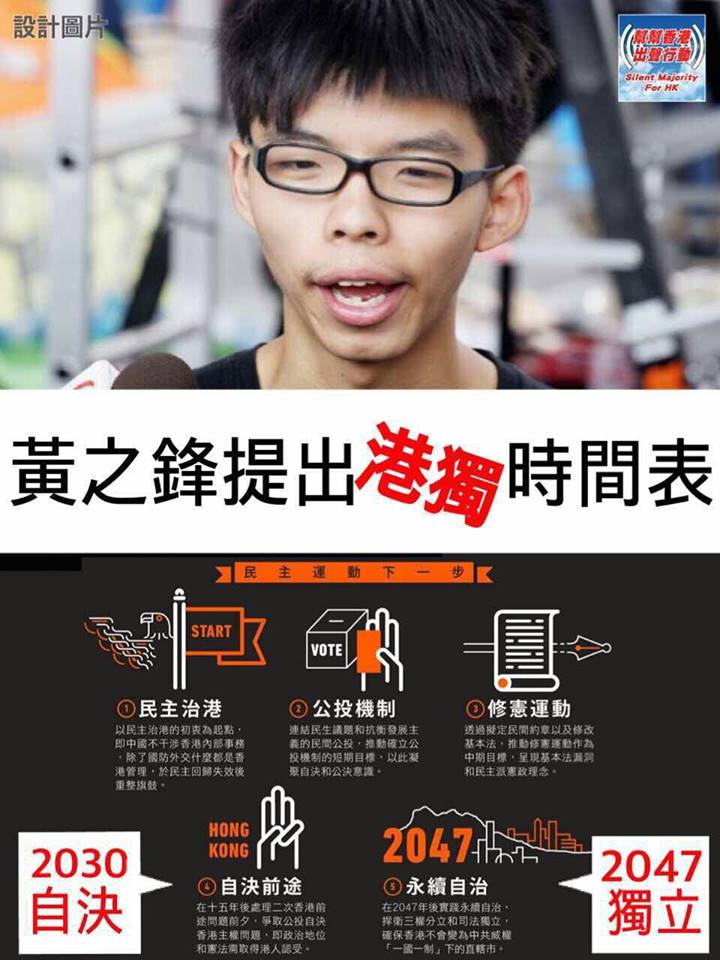
Joshua Wong's timetable for Hong
Kong independence:
(1) Democratic rule in Hong Kong,
with China taking care only of national defense and foreign diplomacy and not
interfering with Hong Kong's internal affairs
(2) Establishment of a referendum
system.
(3) Constitutional amendment of
the Basic Law to reflect democratic ideas
(4) In 2030, Hong Kong will hold a
referendum on its sovereignty
(5) In 2047, Hong Kong will begin
permanent autonomous rule instead of being a city under "one country, one
system"
(Medium)
Commentary on Joshua Wong’s essay on the next phase of the HK democracy
movement. August 19, 2015.
Joshua Wong’s August 2 essay in Ming Pao,
“The next phase of the democracy movement: A referendum on constitutional
reform and sustainable democratic self-governance” (Chinese original /
English translation), is the most substantial vision yet presented by a
prominent democracy movement leader in HK on the future. In fact, since the
Partystate and HK government’s fake universal suffrage proposal was defeated
in the Legislative Council in June, democracy movement leaders have been
conspicuously quiet about the way forward. This is understandable: everyone
is exhausted, needs a break and time to think. Still, it has to be said, the
HK democracy movement hasn’t exactly been blessed by outstanding strategic
thinkers down through the years, and you wonder what it says about the
movement that one of its best thinkers hasn’t yet turned 20.
Indeed, one of the strongest points of
Wong’s essay is that the pan-democrats have largely been strategizing by
default, on autopilot for some years now. They’ve been co-opted by
participation in a rigged system, and it might be even saying a bit much to
characterize what they’ve been doing as “strategizing” since they have been
highly reactive, responding to situations and issues as they arise. Wong
calls their strategy “fight for every inch” and criticizes it. Among other
things, one of the problems with it is that you can be so tightly focused on
that inch you’re fighting for that you forget to look and ask yourself, But
why am I fighting over this, where will it get me? We should thank Wong
simply for demanding that we look up and think long term. One should hope
that his essay (and others like it, for example those he mentions) will lead
to a wide-ranging, inclusive debate.
The essay represents a development in
Wong’s thinking. Already at the time of the demonstrations in June outside
of Legco against the fake universal suffrage proposal, Wong was expressing
some of the ideas now fully articulated in the essay. It is also quite
courageous and forward-looking. He’s willing to dispense with old notions
that he considers outmoded or failed, even if they’re his own. Regarding the
recent past, he says we should be clear about two things: 1) We failed to
persuade the Partystate to fulfill its promise and legal obligation of
introducing genuine universal suffrage to HK, and 2) we should have
absolutely no illusions that under the hardline framework laid down by the
National People’s Congress Standing Committee on August 31 last year — which
the Partystate says is indefinitely binding — , it ever will. In fact, Wong
pretty much concludes we shouldn’t even bother fighting for universal
suffrage on those grounds; at any rate, it shouldn’t be our main focus. In
this sense, the essay clearly demarcates: One era has ended, and another
must begin. But what is the new era? And what should our focus be?
On what Wong calls “the second question of
the future” of HK, namely, what will happen after 2047, the end of the “one
country, two systems” period. In contrast, Wong says we have just concluded
once and for all the period of the “first question of the future”, whether
or not there can be such a thing as real democracy in HK under Chinese
sovereignty. The National People’s Congress Standing Committee decision of
August 31, 2014 said an emphatic no to that.
In this new period of HK history, as Wong
characterizes it, the long-term goals of the democracy movement, and the
goals for HK beyond 2047, should be what Wong calls self-governance or
self-determination.
After the debacle of fake reform and the
refusal of the Partystate and HK government to heed the voice of the people,
Wong sees an impasse and what he calls a predicament for the democracy
movement. In thinking his way out of this impasse, it is clear that Wong has
been significantly influenced by proponents of localism, with his emphasis
on self-governance or self-determination. He seems to more or less be
saying, I don’t think the localists stand much of a chance of appealing to
the mainstream because they’re perceived as too extreme, but I more or less
agree with them, and the question is how to take their basic stance, develop
it and make it palatable to ordinary HK people. In this, of course, Wong is
distancing himself even further from traditional pan-democrats who, as said,
have been largely silent since the defeat of fake suffrage, thus appearing
to have no road map of their own, and risking appearing to be a spent force
(at least in terms of ideas; they will probably continue to elect a
significant number of representatives in the formal political system). Wong
differs from some localists in that he doesn’t call for independence or even
say exactly what the relationship between the Partystate-ruled mainland and
HK should be; he appears to think that is for the people of HK to determine.
But he thinks that something must be done to encourage HK people to take
their fate into their own hands and see themselves as being able to act
autonomously from the Partystate. And that something is referendums, and, at
a further remove, a later date, deliberations on constitutional amendments
or even a new constitution.
Before commenting on Wong’s ideas about
referendums, I should mention that it’s striking that there is virtually no
mention of the Partystate in Wong’s essay and no discussion of what the
relationship between HK and the Partystate should be. Wong merely states
that the fake reform process has shown that it’s an illusion to believe that
you can ever negotiate in good faith with the Partystate. It seems that, in
concluding that, Wong has pretty much written the Partystate off. This is a
very interesting stance. At first, I found it peculiar, but then I thought,
Yes, why not act as if Beijing had nothing to do with it, as if Beijing’s
refusal to grant real suffrage to HK renders it irrelevant in deciding HK’s
future. It had a chance to play a role in determining that, and it missed
the boat. Now, Wong seems to say, this is between HK people; it’s for HK
people to sort out; and we shouldn’t just resign ourselves to the idea that
our fate lies entirely in the Partystate’s hands, let alone waste our time
bothering to appeal to it; we must grasp that fate in our own hands. We must
act as if that is simply the way that it is until that is the way that it
is. We will achieve self-determination with or without you; now, most
likely, without you. Of course, Beijing does matter — it’s still the gorilla
that stands between HK and its aspirations — , but in its refusal to be a
partner in HK achieving suffrage, it has rendered itself a bystander. Wong
seems to be encouraging HK people to “act as if” — act as if you live in a
democratic society in order to realize a democratic society. And his strong
advocacy of referendums resembles concepts of the “parallel society”: If the
government is unelected, lacks legitimacy and stands in the way of the
people’s aspirations, then construct a parallel society, to reject the
illegitimate government, to give people confidence in taking their fate into
their own hands and help them to learn to act democratically, to prepare for
the day when the people will be their own rulers.
Wong’s idea for referendums may be part of
the way to go about that. It is very interesting and clearly worth debating.
But there is also some fuzziness regarding exactly how he sees them working.
In particular, it’s unclear what he sees as the relationship between
unofficial, autonomous referendums conducted by the people and not
recognized by the government, like Occupy Central’s referendum on universal
suffrage in June 2014, and official referendums held by the government. He
seems to think we should start out holding unofficial referendums. This
coupled with other pressures will eventually lead to the introduction of
legislation legalizing referendums, leading in turn to officially conducted
referendums which will eventually encompass constitutional issues such as
amendments to the Basic Law, perhaps eventually even replacement of the
Basic Law with a constitution more appropriate to HK (and more democratic
than the current Basic Law).
Wong is often interested in how realistic a
proposal is — he is quite a pragmatic thinker. On pragmatic grounds, he
criticizes simply keeping on pushing for universal suffrage as long as the
Partystate persists in declaring the 8/31 decision as in effect once and for
all. But applying that same pragmatic criterion to referendums, it’s hard to
imagine how we might ever get to the point where the Partystate would allow
the HK government to pass legislation to legalize referendums, in which
case, referendums could still be held unofficially and could still be an
important gauge of public opinion and an important way of encouraging public
engagement, but it seems to me that the risk is that, after a while, people
will lose enthusiasm when they see that their vote has no effect.
Referendums can be an excellent way to
reach out to people who for whatever reason haven’t been participating and
get them involved, if there are ways of capturing the interest it takes to
cast a vote and translate that into more active, consistent and substantive
political action, though the democracy movement has not been terribly good
at that up to now. 800,000 people voted in Occupy Central’s June 2014
referendum, numbers-wise probably the largest participation in any political
event outside of official elections. But that may have had a lot to do with
the timing, coming right after the Partystate’s publication of the White
Paper on HK and in the lead-up to the NPCSC decision: It was seen as a
historic moment. Previous to that, the 2010 by-elections triggered by the
resignation of five pan-democrats from Legco, the so-called five-district
referendum, had a turnout of 17%. It was considered a failure. Of course,
that too is down to specific circumstances, in particular, the pro-Partystate
camp’s refusal to participate. Wong’s idea of tapping into strong public
interest in particular issues such as TV licensing and the Northeast New
Territories development projects is good but there’s also the possibility
that after a while, unofficial referendums come to be seen as hum-drum and,
yes, ineffectual. There are few societies that use referendums as actively
and frequently as Wong is proposing HK should do. Switzerland is one of the
few. It would be great if we could be Switzerland; it’s just very hard to
see that happening.
The same goes for constitutional
amendments, a constitutional assembly. Perhaps we should use unofficial
referendums and other events outside of the official political system to
arrive at a consensus within the democracy movement about which articles of
the Basic Law need amending and how, or, alternatively, what a constitution
that really suits HK would look like. Among other things, this would
increase wider public awareness of the flaws in the Basic Law and shift the
political discourse, a message to the Partystate that since it refuses to
grant the political rights enshrined in the Basic Law, the people of HK are
moving beyond it. It would also, eventually, provide a more concrete and
specified vision of what we’d like to see. In this sense, the issues of a
referendum law and an officially recognized constitutional assembly can be
bracketed off: if we ever get there, great, but if not, the unofficial
referendums and other activities on constitutional matters can be useful
nevertheless in articulating a united and coherent vision of the future.
Wong’s ultimate objectives of
self-determination and self-governance seem worthy. It’s just that perhaps
he pins too much hope on referendums as the means of getting there. Perhaps
referendums can be one of many ways to work towards those long-term
objectives. Perhaps we need to ask, What other actions can be taken to
encourage HK people to take their fate into their own hands and to work
toward self-determination, self-governance? And then construct a strategy, a
roadmap based on our answers to that. Wong’s fear here, probably, would be
that we get bogged down again in the “fight every inch” strategy which is
largely reactive, fighting against the worst rather than aiming for the
best. After all, it is often the case that it’s easier to get people to say
a big no to an imminent danger (Article 23, fake suffrage, etc) and to get
people to focus on the short term than to participate in a long-term project
towards a positive end. With that in mind, we should aim to be pro-active,
asking ourselves what furthers the aims of self-determination and
self-governance and aiming to tap into the huge reservoir of frustration of
those who participated in the Umbrella Movement and are looking around to
see what we can do now. So much depends, as ever, on how many people — but
those who have been involved up to now and those who have not — we manage to
convince to be politically active in the struggle — which as Wong
emphasizes, will play out in the long term, over the decades to come. Having
staying power over the long-term also requires the development of
organizations and institutions which outlive individuals, and this is one of
many areas that needs greater focus.
Internet comments:
- There is no legal basis in Hong
Kong for a referendum system. A referendum involves a simple
statement (such as "no new taxes"), but the devil will be in the details. For
example, you can hold a referendum on whether the Basic Law should be amended to
incorporate democratic ideas. Of course, you will get an overwhelming approval
because there is nothing to dislike about
mom and apple pie. But next you have to say what and how you
specifically want to amend, and that can become very complicated.
For example, look at the so-called
Occupy Central referendum: All three options proposed that candidates be
nominated publicly. Whoever framed the referendum has decided that you must have
civil nomination PERIOD, even if it does not comply with the Basic Law and is
therefore unconstitutional and unworkable. With respect to such referenda, you
should ask: Who is framing these choices? Whose interests do they represent?
Whose interests are they hurting?
Occupy Central deliberations:
Three deliberation days were held on 9
June 2013, 9 March 2014, and 6 May 2014 respectively.
On the third deliberation day, the
Occupy Central participants voted on electoral reform proposals put
forward by different organisations for the civil referendum. A total of
2,508 votes were cast in the poll. All three selected proposals
contained the concept of civil nomination, which the mainlandChina
officials had said did not comply with the Basic Law. The proposal by
student groups Scholarism and Hong Kong Federation of Students which
allowed for public nomination, received 1,124 votes – 45 percent of the
vote. People Power's proposal came in second with 685 votes, while the
three-track proposal by the Alliance for True Democracy consisting of 27
pan-democracy lawmakers got 445 votes. The proposal from Hong Kong 2020
received 43 votes, while the civil recommendation proposed by 18
academics got 74 votes.
The three proposals chosen by the
members of Occupy Central deliberation panel were considered to be more
radical. The League of Social Democrats and People Power lawmakers,
despite being part of the Alliance for True Democracy, urged their
supporters to vote against the alliance's proposals. More moderate
pan-democrats that avoided the notion of civic nomination were
effectively squeezed out. Civic Party lawmaker Ronny Tong Ka-wah, who
saw his moderate plan rejected in a poll believed "the Occupy Central
movement has been hijacked by radicals". He believed that the poll
results would make it harder to find a reform package Beijing would
agree to and that wins over the five or so pan-democrats it will need
for a two-thirds majority in LegCo. He also believed Occupy's plan to
block streets in Central would be likely to go ahead. This, and the
decision of People Power and the League of Social Democrats to go back
on pledges to support the alliance's proposals, and of People Power to
make its own proposal that included civil nomination, pointed to a split
in pan democrat ranks.
[Question: Who are those 2,508 voters
on the third deliberation day? How are they more representative of the
people of Hong Kong than the 1,200-person election committee for the
Chief Executive? No, they were simply top-loaded by People Power
and League of Social Democrats supporters. Why should you buy into this
and choose among the three (and only three) options?]
So this is all about who gets to
hijack the Committee to Frame the Referendum.
- (Wikipedia)
Criticism of populist aspect of Referenda
Critics of the referendum argue that
voters in a referendum are more likely driven by transient whims than
careful deliberation, or that they are not sufficiently informed to make
decisions on complicated or technical issues. Also, voters might be swayed
by strong personalities, propaganda and expensive advertising campaigns.
James Madison argued that direct democracy is the "tyranny of the
majority."
Some opposition to the referendum has
arisen from its use by dictators such as Adolf Hitler and Benito Mussolini
who, it is argued, used the plebiscite to disguise oppressive policies as
populism. Hitler's use of plebiscites is argued as reason why, since World
War II, there has been no provision in Germany for the holding of
referendums at the federal level.
- To quote the last British governor of
Hong Kong
Chris
Patten:
British politician Chris Patten
summarized many of the arguments used by those who oppose the referendum
in an interview in 2003 when discussing the possibility of a referendum in
the United Kingdom on the European Union Constitution:
I think referendums are awful. The late
and great Julian Critchley used to say that, not very surprisingly, they
were the favourite form of plebiscitary democracy of Mussolini and
Hitler. They undermine Westminster. What they ensure, as we saw in the
last election, is --- if you have a referendum on an issue --- then
politicians during an election campaign will say: "Oh, we're not going
to talk about that, we don't need to talk about that, that's all for the
referendum." So during the last election campaign, the euro was hardly
debated. I think referendums are fundamentally anti-democratic in our
system and I wouldn't have anything to do with them. On the whole,
governments only concede them when governments are weak.
-
Basic Law Article 159
The power of amendment of this Law
shall be vested in the National People's Congress.
The power to propose bills for amendments to this Law shall be vested in the
Standing Committee of the National People's Congress, the State Council and the
Hong Kong Special Administrative Region. Amendment bills from the Hong Kong
Special Administrative Region shall be submitted to the National People's
Congress by the delegation of the Region to the National People's Congress after
obtaining the consent of two-thirds of the deputies of the Region to the
National People's Congress, two-thirds of all the members of the Legislative
Council of the Region, and the Chief Executive of the Region.
Before a bill for amendment to this Law is put on the agenda of the National
People's Congress, the Committee for the Basic Law of the Hong Kong Special
Administrative Region shall study it and submit its views.
No amendment to this Law shall contravene the established basic policies of the
People's Republic of China regarding Hong Kong.
So what is Comrade Joshua Wong's
plan to get the Standing Committee of the National People's Congress, the State
Council and the Hong Kong Special Administrative Region to do his biding? Right now, he
can't seem to get "the consent of two-thirds of the deputies of the Region to
the National People's Congress, two-thirds of all the members of the Legislative
Council of the Region, and the Chief Executive of the Region."
By vetoing the constitutional
reform in June this year, the pan-democrats have made sure that there will be no
universal suffrage for either the Chief Executive or the Legislative Council at
least until 2022. Therefore, it will be impossible to get the consent of the
Chief Executive or two-thirds of all the members of the Legislative Council
within that time period.
If you can't get them to approve,
then you can't amend Basic Law Article 159 so that amendments get to be
introduced via referenda. You are caught in an infinite loop.
P.S. Wong said:
"Say, for example, during the Umbrella Movement, if two
million Hong Kong people had occupied the streets, along with labour
strikes, and if this had continued for more than two months, we would have
had enough bargaining power." Good luck with that!
The problem with the Umbrella
Revolution is that NOTHING was achieved after 79 days. NOTHING. Do you really
think that two million people occupying the streets and stopping work for two
months will accomplish ANYTHING?
- "Two million people occupying
the streets along with labor strikes for more than two months?" TIME/Fortune
"global thinker/leader" Joshua Wong has plenty of support. According to a recent
poll (see #296), his organization
Scholarism is supported by 0.1% of the people of Hong Kong. 0.1% of 7,000,000 is
70,000. Wong has to find 1,930,000 persons from somewhere else. And for two
months with no work (and therefore no pay).
- Frankly, Joshua Wong's roadmap
is a list of keywords: democracy, governance, national defense, national
security, foreign policy, referendum, autonomy, self-rule, constitutional
amendment, charter, sovereignty, separation of powers, authoritarianism, etc.
There is no coherent vision of how these things come together and work under the
circumstances.
|
Age group |
2014 #voters |
2014% |
Change |
2015 #voters |
2015% |
|
71+ |
462,853 |
13.2% |
23,223 |
486,076 |
13.2% |
|
66-70 |
206,032 |
5.9% |
37,156 |
243,188 |
6.6% |
|
61-65 |
312,604 |
8.9% |
24,591 |
337,195 |
9.1% |
|
56-60 |
392,364 |
11.2% |
29,981 |
422,345 |
11.4% |
|
51-55 |
427,616 |
12.2% |
4,601 |
432,217 |
11.7% |
|
46-50 |
337,354 |
9.6% |
-4,037 |
333,317 |
9.0% |
|
41-45 |
280,690 |
8.0% |
17,345 |
298,035 |
8.1% |
|
36-40 |
260,032 |
7.4% |
7,410 |
267,442 |
7.2% |
|
31-35 |
248,118 |
7.1% |
4,667 |
252,785 |
6.9% |
|
26-30 |
216,508 |
6.2% |
20,993 |
237,501 |
6.4% |
|
21-25 |
257,295 |
7.3% |
10,253 |
267,548 |
7.3% |
|
18-20 |
106,320 |
3.0% |
5,391 |
111,711 |
3.0% |
|
Total |
3,507,786 |
100.0% |
181,574 |
3,689,360 |
100.0% |
Internet comments:
- The common belief is that the
supporters of the pan-democrats are younger, wealthier and better educated. The
pan-democrats hope for a massive surge of young voters for the upcoming District
Council elections in 2015 and the Legislative Council elections in 2016. What
happened was that there are now even more older voters. For example, voters aged
over 50 was 51.4% in 2014 and 52.1% in 2015.
- In the district council
elections, it is winner-take-all in each district. So it will be a rout of the
pan-democrats on the basis of the age distribution of voters. In the legislative
council elections, the method is proportional representation. For example, the six
highest vote-getters will be elected in Kowloon West. Therefore, it is probable
that the sixth and last legislator will get in with only 11% or 12% of the
votes.
- Everybody knows that the key to
district council elections is not demographics. This is what it is all about:
Snake banquets, vegetarian meals, mooncakes, rice dumplings and other small
favors to curry favors with senior citizen voters. Everybody does it. They have
to. Please don't tell me about
Alexis de Tocqueville.
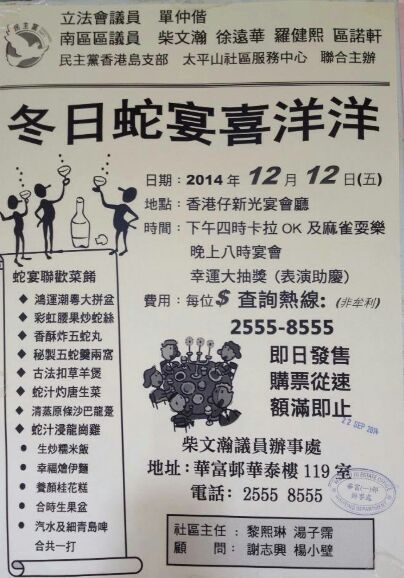
Democratic Party legislator Sin Chung-kai's pamphlet for snake banquet
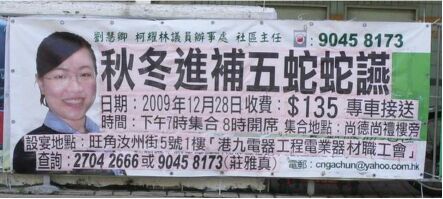
Democratic Party legislator Emily Lau's pamphlet
for snake banquet (@ 135 per person, transportation provided)
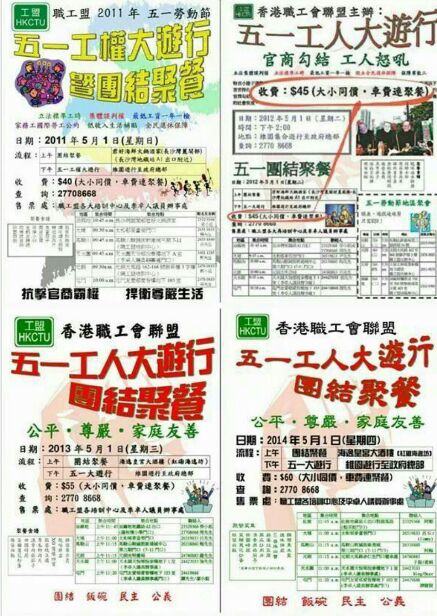
Confederation of Trade Unions pamphlet for May 1st
Unity Dinner (@ $45 per person)
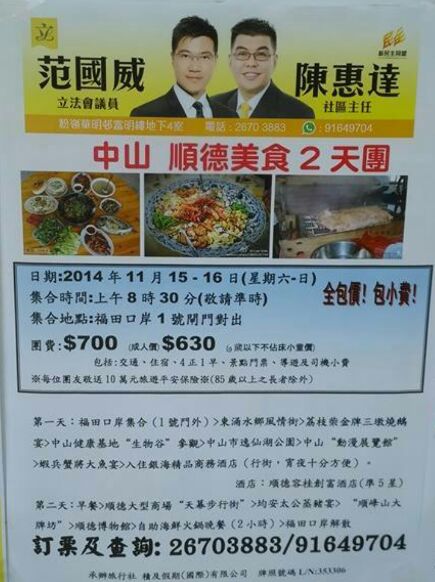
Neo Democrats' Gary Fan Kwok-wai's pamphlet for
2-day Zhongshan-Shunde gourmet trip ($700 per adult)
Q1. What is your impression of
Hong Kong political parties compared to one year ago?
60.9%: Worse
31.2%: The same
4.7%: Better
3.2%: Don't know/hard to say
Q2. Are you optimistic/pessimistic
towards the prospects of political parties in Hong Kong?
53.5%: Pessimistic
31.1%: Half-half
10.0%: Optimistic
5.4%: Don't know/hard to say
Q3. What is your overall
satisfaction rate about Hong Kong political parties?
43.9%: Dissatisfied
43.9%: So-so
7.5%: Satisfied
4.8%: Don't know/hard to say
Q4. What are your impressions and
views of the Hong Kong political parties?
They often bicker with each other
and basically cannot accomplish anything
16.9%: Disagree
23.3%: Half-half
57.4%: Agree
2.5%: Don't know/hard to say
In Hong Kong, people join
political parties to obtain more benefits for themselves instead of looking
after the welfare of citizens
12.8%: Disagree
39.4%: Half-half
43.5%: Agree
4.3%: Don't know/hard to say
Hong Kong political parties are
basically representing the views of different citizens
33.7%: Disagree
38.8%: Half-half
23.6%: Agree
3.9%: Don't know/hard to say
Hong Kong political parties can
take in and train political talents
29.1%: Disagree
29.6%: Half-half
36.4%: Agree
4.9%: Don't know/hard to say
Hong Kong political parties can
monitor the government effectively
30.0%: Disagree
36.5%: Half-half
28.6%: Agree
4.9%: Don't know/hard to say
Hongkongers are not much
interested in political parties, and they don't care what the political parties
have said or done before
39.0%: Disagree
30.8%: Half-half
26.0%: Agree
4.2%: Don't know/hard to say
If the Hong Kong government does
not have the support of political parties, many policies cannot be effectively
carried out.
17.0%: Disagree
18.7%: Half-half
61.0%: Agree
3.3%: Don't know/hard to say
Hong Kong political parties cannot
do much because universal suffrage of the Chief Executive and the Legislative
Council has not been implemented
17.5%: Disagree
25.5%: Half-half
50.0%: Agree
7.0%: Don't know/hard to say
Do you think that the Hong Kong
SAR Government should be run by a political party through election?
27.4%: Disagree
32.2%: Half-half
32.0%: Agree
8.4%: Don't know/hard to say
Q5. Which is the Hong Kong
political party or organization that you support the most?
11.3%: DAB
7.5%: Democratic Party
5.7%: Civic Party
1.7%: New People's Party
1.6%: People Power
1.4%: Liberal Party
1.0%: Labour Party
0.9%: League of Social Democrats
0.9%: Federation of Trade Unions
0.1%: Scholarism
0.1%: ADPL
8.3%: Others
55.4%: None
4.1%: Don't know/hard to say
(EJinsight)
July 30, 2015.
You
can’t have two controversial votes on an equally controversial university
appointment and not raise questions from students and alumni. Yet, the
University of Hong Kong (HKU) council would have them believe nothing is the
matter. That is precisely the
problem. Such denials are only fueling concern that HKU has caved to
political pressure and compromised its autonomy.
There’s no doubt the prospective
appointment of an outspoken former law dean, who has been recommended by an
independent search committee to be a pro vice chancellor, is a hot potato.
But if that person wasn’t Johannes Chan, would the council have taken this
long to decide?
After two lopsided votes to delay naming a
pro vice chancellor until after a deputy chancellor has been announced, it’s
clear the council’s problem is Chan. Forget about its purported concern over
procedural issues relating to a more senior appointment.
It’s no
longer about HKU but about a meddlesome government.
Chan’s biggest sin is being linked to
associate law professor Benny Tai, a co-founder of Occupy Central, the civil
disobedience group that played a key role in last year’s democracy protests.
But Chan’s critics are not stopping there. They are harking back to his days
as HKU law dean to accuse him of coddling Tai.
These accusations fall into perspective
after a concerted attempt by two pro-Beijing newspapers to discredit Chan.
In January, Ta Kung Pao and Wen Wei Po ran a series of withering articles
questioning Chan’s competence and integrity. The gist of the criticism
centered on Chan’s alleged failure to maintain the quality of research of
the law faculty. And his integrity became a lightning rod when he was
somehow linked to a political donation to Tai. An internal investigation
found Tai did not follow normal procedure.
The
story has taken a life of its own since a former newspaper editor revealed
an attempt by senior government officials to derail Chan’s appointment.
Later, a damning Apple Daily article directly linked Leung Chun-ying to it.
On Wednesday, the saga took a violent twist when students stormed a council
meeting which had decided on a second delay.
None
of this would have happened if the council had properly managed what should
have been a routine exercise. Such appointments were never a problem when
they were left to the university, its alumni and other stakeholders.
The
fact that the Hong Kong chief executive is the nominal head of its tertiary
institutions as university chancellor never got in the way of the
appointment of senior school administrators.
That is until the government politicized the process. Judging by recent
events, the HKU
council has become a party to this politicization.
Until the
council injects a modicum of transparency into its affairs and creates a
semblance of academic freedom, it will be hard put to defend its claim that
nothing is going on. HKU alumni and
students — and the Hong Kong public at large — deserve to know the score.
(EJinsight)
HKU Council members fail to live by
university motto. By Ip Kin-yuen. July 31, 2015.
July
28th was the darkest day in the history of the University of Hong Kong (HKU).
What happened on that day makes the hearts of all HKU alumni and those who
are concerned about its development ache. Perhaps some people may wonder why
the HKU alumni had to challenge the decision made by the HKU Council, which
has been functioning so well for decades.
True,
the HKU alumni rarely questioned the judgment or decision made by the
Council in the past, because under the University of Hong Kong Ordinance,
the Council is the supreme governing and decision-making body of HKU, and as
long as it makes its decision according to established procedures and due
process, nobody would ever need to challenge its authority.
Unfortunately, as far as the recent controversy surrounding the appointment
of the pro-vice chancellor is concerned, the Council didn’t follow standard
procedures and observe the long-standing tradition of the university.
To
make matters worse, the Council has continued to delay the appointment and
refuse to take a stand on the recommendation made by the recruitment
committee, on the ridiculous and mind-boggling grounds that they have to
wait for the advice of a deputy vice-chancellor who is not even hired yet.
If one
connects the dots between some recent events such as the relentless attacks
launched by pro-Beijing newspapers against Professor Johannes Chan, who has
been widely tipped for the pro-vice chancellor slot, and the rumors that the
Chief Executive has been attempting to interfere in the appointment of key
personnel in the HKU, it is not difficult to notice that political
interference has once again reared its ugly head in the recent appointment
scandal.
Having
said that, the HKU alumni are fully justified in demanding that the
appointment proceed promptly in accordance with standard procedures, and
that the Council stand up against any external political pressure when it
comes to the appointment of key personnel of the HKU.
Some
may also doubt whether the HKU alumni are in a legitimate position to
question the decision of the Council, and whether it constitutes another
form of interference.
According to the rules, members of the HKU include not only its staff and
students at present, but also its graduates. Therefore, even though
graduates have no governing power, they have every legitimate right to
express their views about HKU affairs.
Besides, since the HKU is a publicly funded institution, stakeholders and
members of the public are entitled to give their views on the governance of
the university and demand from the Council to set things right.
Unfortunately, the decision made by the Council on Tuesday was both
heart-breaking and outrageous.
According to newspaper reports, 12 members of the Council voted against
proceeding with the appointment which had been long overdue, regardless of
the dissenting voices raised by 1,536 HKU alumni, 909 supporters and the 21
organizations which had co-signed an open letter urging the university to
respect procedural justice.
Those
members of the Council who cast their votes to stall the appointment again
in fact have not only failed to live up to the expectations of the alumni,
but also committed a serious breach of public trust, causing irreversible
damage to the hard-earned reputation of the HKU as the most respectable
tertiary education institution in the territory.
What
is even more alarming is that what happened to the HKU may not be an
isolated case, and it seems a powerful political force behind the scene is
continuing to get its claws into other universities, and the autonomy and
academic freedom on our university campus promised under the Basic Law have
come under unprecedented threat.
In accordance with the University of Hong
Kong Ordinance, all graduates of the HKU are members of the HKU Convocation,
and we have already called upon the incumbent convocation to summon an
urgent meeting to vote on three resolutions:
1. The HKU Council must confirm the
appointment of the pro-vice chancellor based on the recommendation of the
recruitment committee, or else it must provide a written explanation;
2. The HKU must review the role of the
Chief Executive as the HKU chancellor, and his role should be of a
ceremonial nature only;
3. Passing a vote of no confidence against
Council member Professor Arthur Li Kwok-cheung.
“To
manifest the greatest virtues of man and to push back the frontiers of
knowledge.” That’s the HKU motto which originates from the ancient Chinese
classic The Four Books.
It
teaches all HKU graduates to stand by their principles and convictions and
persevere with what is morally right even when the odds are against them.
(EJinsight)
July 31, 2015.
Microbiologist Yuen Kwok-yung on Friday announced his resignation as staff
representative of the Hong Kong University Council. Yuen said he had
received “no relevant political training” and thus he regarded himself as
“incompetent as a council member in finding the way to lead the University
of Hong Kong out”. He said he would devote himself to the research of fungal
bacteria instead.
He
stressed that he was not resigning because of the raging controversy over
the delay in the appointment of Johannes Chan as the university’s pro-vice
chancellor amid allegations that the government was meddling in the case to
shut out the former law dean because of his political views.
On Tuesday night, a meeting of the
HKU Council was disrupted after students and alumni members broke into the
room to protest the
delay in the appointment.
Yuen said
he was not dispirited, nor was he leaving his post to please anyone or give
in to any influential people.
In the
past 100 years, Hong Kong had been very successful in merging seemingly
contradictory values and cultures of the East and West, he said. However, he
said, Hong Kong and HKU seemed to have failed to continue doing so in the
past three years and under the “one country, two systems” principle.
Yuen said he was not suggesting that the
“one country, two systems” was to blame, but that “after so many years under
the ‘one country, two systems’, somehow we [Hong Kong] suddenly failed to
find a way out”.
As a
former council member, Yuen said he respects all decisions made together.
Regarding the incident on
Tuesday night, he said he would not want to see anybody swearing, throwing
things or resorting violence. He added that it was too early to conclude
that the misconduct was done by HKU students.
Andrew
Fung Ho-keung, an HKU convocation member, said council members hold
different views regarding the decision to delay the appointment of the
pro-vice chancellor, and he worries that the university will be torn apart
because of the issue. Fung said he is
also concerned that the HKU would be regarded as a “hot kitchen” where no
one is willing to join the senior management team.
He
said he regretted that non-HKU people were protesting outside the council
meeting.
(EJinsight)
July 31, 2015.
A
group of senior academics is warning the University of Hong Kong to abide by
the principles of academic freedom and autonomy in an unprecedented
challenge to its governing council over delays in the appointment of a key
official. The group, consisting
of 10 deans of the university faculty, said such principles are protected by
Article 137 of the Basic Law, Hong Kong’s mini constitution. These apply to
all aspects of the decision-making process, especially senior appointments,
they said in a joint statement cited by Ming Pao Daily.
The
statement came after a dozen students disrupted a meeting on Tuesday when
the university council voted to reaffirm an earlier decision to delay naming
a pro vice chancellor until after a deputy vice chancellor has been
appointed. The deans urged all parties to put the university’s interests
first and redouble efforts toward consensus.
Council chairman Leong Che-hung welcomed the statement, saying senior
academics and administrators of the university share the same goal of
maintaining academic freedom and autonomy.
An
unnamed senior professor said the deans are a powerful group that can
influence decisions by the council. In recent years, they have successfully
lobbied against funding cuts, he said. However, he said their statement is
not a show of support for vice chancellor Peter Mathieson who is opposed to
any more delays in the appointment of a vice pro chancellor.
(SCMP)
August 2, 2015.
The University of Hong Kong should say no
to politics as the political conflicts surrounding the appointment of a key
manager have become irrational and damaged the way its governing body works,
a council member said on Sunday morning.
The comments by Professor Lo Chung-mau came
two days after the resignation of another council member, Dr Yuen Kwok-yung, who
said “a lot of outside political forces” had tried to affect the body’s
decisions.
At the centre of the row is the
university’s former law dean, Professor Johannes Chan Man-mun, who had been
told he would become a pro-vice-chancellor in charge of academic staffing
and resources from March this year. But this was put on hold after
pro-Beijing newspapers criticised him over his working relationship with HKU
legal scholar and Occupy Central co-founder Benny Tai Yiu-ting. On June 30,
the council voted 12-6 to delay Chan’s appointment until a provost was
hired. When the council met again on July 28, students forced their way in
to the meeting venue to call for a halt to the delay.
Professor Lo, who supported the deferral
and whose collapse during the chaos on July 28 was ridiculed online as a
footballer’s “dive”, said he hoped politics could leave the university. “The
two forces have been pressuring the university, damaging the functioning of
the council,” said the medical professor. “HKU should say no to politics.”
Speaking on a Commercial Radio programme in
the morning, he also criticised the students and other members of society
who opposed the deferral for using “violence” instead of expressing their
views in a rational way. “Political conflicts are very ugly,” he said,
citing people who cursed him after he fell with an injured knee and those
who blocked an ambulance to take him to hospital. “It is not rational at
all. It makes people mad.” “Hong Kong society should send a strong signal
[to opponents] that you have done wrong,” he said.
Another council member, Man Cheuk-fei, said
there had been political forces in the university for a long time, citing a
visit to the campus in August 2011 by then vice-premier Li Keqiang, when
police took control and limited protests by students, who accused officers
of violating their civil rights. Man said the delay in appointing a new
pro-vice-chancellor was the natural result of Chan’s involvement in an
investigation over donations received by Tai. The investigation report said
Chan “fell below expected standards” in handling the donations as Tai’s
supervisor at the time. The council decided to accept the report at a June
30 meeting. “The whole [investigation] process was only completed last
month,” said Man. “I don’t feel there is a strong force trying to delay the
appointment.”
Internet comments:
- (RTHK)
Hong Kong University Student Union president Billy Fung: "It was the system
that forced us to take action to resist. If you think that our method was a
form of violence, then I would describe what we did as 'using force to stop
tyranny.'"
Listener Mr. Wong: "Back then we were only interesting in running a student
club. But in this case, it was clear that you were wrong first.
Firstly, when you are wrong, you should admit that you are wrong.
Secondly, when an organization wants to hire or promote a certain
individual, it is not up to you as a small group of so-called employees or
students to criticize or stop the school or its president. That is
preposterous."
Listener Ms. Wong: "I am a secondary school teacher myself. First of all, I
do no oppose the freedom of expression. But I see the university students
use clashes to express their views. They have received so much education,
but they don't know how to use reason to persuade people. They use verbal
and physical violence instead. I am somewhat disappointed."
At 1:19, the video showed the students blocking the doorway to the
conference room even as Billy Fung said that they did not blockade anything.
At 1:28, Yvonne Leung shouted that the university council members must sit
down.
- Hong Kong University has become a very
hot kitchen. (Oriental
Daily) According to University Council chairman Leong Che-hung, a
candidate for the opened Provost position has suddenly "withdrawn" from
consideration. This is understandable, because the Provost is not hired to
run the university. Instead, he is there to deal with external political
forces which he cannot influence.
- (Oriental
Daily) During the 79 days of Occupy Central, the students led most
of the time. From the initial charge into Civic Plaza to the siege of the
Government Headquarters, the students went ahead without coordinating with
the pan-democrats. It was clear that the pan-democrats were hijacked aboard.
In order to dilute the negative effects of Occupy Central and the veto of
the constitutional reform package, the pan-democrats are trying to keep a
low profile and turn to livelihood issues (such as lead-in-water). But now
the students have suddenly sprung the pro vice chancellor appointment. Some
pan-democrats tried to exploit the situation and now suddenly they find
themselves in another Occupy situation.
On the evening of the violence, various
pan-democrats either as alumni or political party members were present
outside the Knowles Building. They were not involved in occupying the tenth
floor conference room. Most of those involved in surrounding the council
members downstairs were foul-mouthed louts and not pan-democratic
politicians. Nevertheless by being present watching and refusing to
intervene, the pan-democrats got caught in a situation where they will do
wrong no matter what. Politicians Ip Kin-yuen, Alan Leong and Audrey Yu were
spotted at the scene watching university council members being surrounded by
students and not allowed to leave. The Democratic Party did better, because
only Sin Chung-kai was present for a short while.
- (Oriental
Daily) According to information, a senior Hong Kong University
official whose contract is scheduled for a long time is looking for a job
all over the world. He plans to leave as soon as he can procure another
position elsewhere. There are two different interpretations of his decision.
On one side, the students argue that he did so because the university
council delayed the decision on the pro vice-chancellor. On the other side,
the critics said that the violent actions of the students is scaring
everyone inside and outside the university.
- (Oriental
Daily)
Our newspaper reporter trailed university
council member Ayesha Macpherson who was surrounded and cursed out by
demonstrators for half an hour at the exit from the parking garage. During
this period, senior barrister Civic Party member Audrey Eu watched from
the side and declined to help.
Yesterday, Audrey Eu denied that she did
nothing. She said that when she saw Ayesha Macpherson feeling
uncomfortable, she arranged for her fellow Civic Party Kwok Ka-kay to seek
help. But Kwok was rejected by the police present, because they had
already arranged for an ambulance to come.
But based upon a review of the relevant
news videos and the recollections of the eyewitnesses, Audrey Eu did what
she said only after a long period of time. Prior to that, Eu stood with
the other demonstrators to chant "Shameless" at Ayesha Macpherson. When
she saw things going awry, she jumped to the side. She never exercised her
political influence to call for the demonstrators to calm down.
Meanwhile Hong Kong University Student
Development and Resources director Ko Wing-yin actually tried to assist Ayesha Macpherson.
For his troubles, Ko was hit on his back, hands and legs by the
demonstrators. His jacket was ripped and there was a two-inch long scratch
mark on his arm. Ayesha Macpherson asked the security guards to call an
ambulance and inform the police herself. Audrey Eu offered to help only
after the police arrived, not before.
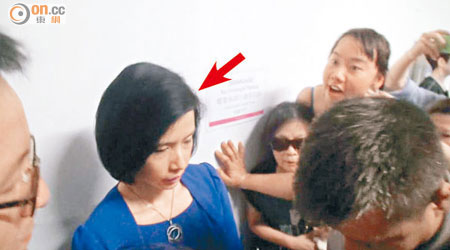
(Bastille
Post) When Ayesha Macpherson got to the parking garage, she was
surrounded by demonstrators and cursed out for 30 minutes. She said that
she attempted to communicate with the demonstrators, but they refused to
let her speak. They just continued to curse her out. One demonstrator told
her: "If you want to leave, you'll have to get down on your knees and
apologize." The demonstrators also called her "Shameless!" Therefore she
chose to remain silent. Because it was hot there, she told the security
guards that she felt ill. The security guards decided to summon the police
as well as an ambulance. She condemned the university administration for
not getting police assistance sooner and expressing "regret" that the
police should be present on campus. Meanwhile Professor Yuen Kwok-yung
also confirmed that the demonstrators wouldn't let the university council
members leave by ambulance. He said that the ambulance could not have left
without police assistance. Given what has happened, what person in their
right minds would serve on the university council?
- (Oriental
Daily) A number of Hong Kong University university council members
and staff members condemned HKU president Peter Mathieson for saying that it
was "regrettable" that the police should come on campus. They accused the
university administration of not helping the besieged university council
members in a timely manner. Yesterday, Peter Mathieson explained that he did
not say that the police presence was "regrettable." Instead, he meant that
the entire incident was "regrettable." But some university council members
said that the university administration is indeed wary of summoning the
police as a result of what happened four years ago during the visit of
Premier Li Keqiang. Meanwhile a HKU board director said that Peter
Mathieson's original statement was "regrettable."
- (Speakout
HK) After Lo Chung-mo fell down on the floor grabbing his knee, at
least two companies used Facebook to run advertisements that exploited his
case. But both advertisements disappeared in less than a day. Immediately
Internet users cried "Self censorship!" But that may be a reasonable
inference, but it is actually not reasonable. There is consensus that any
advertisement should not exploit tragedy or disaster. That is, you never
gloat on the misfortune of others. Whether you like Lo Chung-mo or not, it
is on the record that a doctor has confirmed the signs of an injury
(bruise/swelling) and that he had previously received surgery on that knee.
In other words, Lo Chung-mo is a patient. Any advertisement that attempts to
exploit his illness is unacceptable. The companies had no choice but to pull
those advertisements.
- (Apple
Daily) Lo Chung-mo said that he was really disappointed with the
fact that when he asked a doctor at the scene to help him leave, he got the
response from the doctor: "It's none of my buinsess. I didn't bring these
people here ..." To Lo's mind, a doctor is supposed to help a patient
irregardless of the politics. That was why Lo expressed his dislike for the
kind of politics that will make a doctor go blind.
When Apple Daily checked the videos, they
spotted the HKU Last Line of
Defence's Dr. Paul Au Yiu-kai calling out for the crowd to disperse in order
to allow Lo get on the ambulance. "Let him out! Let him out!" But everybody
ignored Au and kept cursing Lo out.
Later Au explained to Lo: "We can't control
this." Lo responded: "You caused this." Au countered: "We didn't do this.
The University Council did this." Dr. Yuen Kwok-yung asked Au to help to
clear the path. Au responded: "I am a doctor. I did not come to help." Then
Au called out on the megaphone: "According to my understanding, Professor Lo
has sustained an injury. Please make way for him to come over."
Au said that he asked many times for people
to clear the way to no effect. He left only after he saw the security guards
and police arrive at the scene.
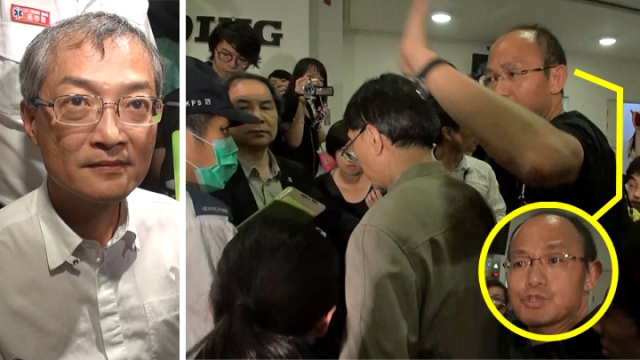
Internet comment:
- That figures. Paul Au Yiu-kai is the
husband of Audrey Eu. Of course, they would both fold their arms and watch
the show.
- There are two possibilities. First,
Paul Au Yiu-kai is telling the truth. Then the fact that the students
ignored the pleas from a doctor shows that they are cold-blooded
stone-hearted animals. Secondly, Paul Au Yiu-kai is lying. Then he is
shameless and unfit to be a medical doctor. Take your pick. If you can't
decide between the two, then both are true.
- (TVB)
At 2:00, Yuen Kwok-yung said: "You are a doctor. You open the path ahead."
The doctor replied: "I am a doctor. I am not an aide."
- If you look at the various videos, the
loudest and most forceful people are much older than the typical
university student. When the reporters tried to interview them, they
quickly dash off. They don't see to have any demands to articulate.
- The famous saying of Paul Au Yiu-kai
that is going around the Internet like wildfire; "I did not bring the
people who beat you up." Therefore I am not responsible for anything.
- (dbc)
0:14 Alan Leong, Civic Party legislator:
You say, Alan Leong, why don't you criticize the students? Meanwhile, have
I praised the students?
0:20 Leong: Students ... all adults ... are responsible for their own
actions. That's very correct. So what are you nervous about?
0:39 Alan Leong: CY Leung first appointed
Lo Chung-mo, Arthur Li. Then ...
0:44 Radio host: Lo Chung-mo was elected by the university staff.
0:47 Alan Leong (note: watch that facial expression!!!): Lo Chung Mo was
... yes, yes, yes ... Oh, you are really right. But, I want to say that
... what's his name ... I want to say that CY Leung appointed ...
- (Bastille
Post)
Civic Party members Alan Leong and Audrey
Eu, and Education sector legislator Ip Kin-yuen caught the blame for this
incident. They were involved in mobilizing people to demonstrate at the
university council meeting. However, the most radical demonstrators were
the Localists, who were most enthusiastic in their use of foul language to
curse out the council members. When the demonstrators surrounded the
university council members on their way out, Alan Leong and Audrey Eu were
near the scene. They played observers who did not intervene with the
demonstrators surrounding the university council members.
This is a re-run of Occupy Central. The
radical elements cause trouble and then immediately leave without assuming
any responsibility. Instead Alan Leong and Ip Kin-yuen have to come out
every day to answer questions. Given that they refused to utter a single
word to condemn the actions, they now own the responsibility. This will be
bad for the Civic Party in the Legco elections next year. On one hand, the
voters who like radical action will vote the radical political parties and
not the elitist Civic Party with their scholars and lawyers. On the other
hand, their moderate supporters will be scared away by their radical
actions.
- (TVB)
During the selection process of the pro
vice chancellor, all information is supposed to be kept confidential
according to university regulations. The recommended candidate has so far
not been presented to the university council.
In February this year, former Ming
ex-chief editor Kevin Lau wrote that the selection committee has
unanimously recommended Johannes Chan. Late July this year, Kevin Lau
wrote that "the pro-establishment university council members led by Arthur
Li and Leong Che-hung came up with a plan to ask a heavy-weight middleman
to persuade Johannes Chan to resign immediately after he received the
appointment."
Arthur Li responded: "Now that Johannes
Chan has clarified that I did no such thing, we have to question why Kevin
Lau as a respected journalist and former editor-in-chief of Ming Pao can
commit such a basic mistake? In Journalism 101, you are told that you need
to verify your information. Why didn't he just call me up and ask whether
I did this?" The commentary has affected me, because many people have only
read Kevin Lau's article in Ming Pao and they think that I was
manipulating the whole affair."
Kevin Lau said that he did not need to
get Li's response: "Before I wrote the commentary, it is not essential
that I get his response. Besides, I made it very clear that he did not
call up Johannes Chan. I only said that pro-establishment university
council members came up with this plan and used a middleman. And Johannes
Chan has confirmed that a middleman contacted him to get him to withdraw."
Kevin Lau added that he instructed Ming
Pao reporters to get the principals' responses: "As a commentator, I only
need to be careful about my wording. As to which pro-establishment
university council members came up with whatever plan, I don't necessarily
need to spell out which university council member made phone calls. But
the colleagues in the news room might call up everybody and ask: 'Did you
do this?' Leong Che-hung did not respond, and Arthur Li had the chance to
respond."
On the day when Ming Pao published Kevin
Lau's essay, a news story quoted Kevin Lau's assertions but they did not
publish any response from Arthur Li about whether he used a middleman.
Internet comment:
- Kevin Lau is being disingenuous here.
Here is a simple explanation of
The difference between reporting and commentary from The
Rocky Mountain Collegian:
Journalists are held to a very high
standard of ethics and are expected to meet that standard on a daily
basis. It is a fair assumption to make; after all, we are trusted to
report the truth of what is happening in the world we live in, and
what we say carries an enormous impact.
The public has a right to expect the
best from us. But the public also needs to be aware of a particularly
distinct division between journalists when they seek to enforce a
standard of excellence.
The primary division between us is
that of reporters and commentators, which essentially splits us into
the “news” section of the newspaper, and the “opinion” section. More
often than not, the public treats both sections as if they are one and
the same.
I’ll be blunt: they are not the same
thing. I do not report the news; I give my opinion on the news. The
Collegian’s reporters report the news; they do not give their opinions
on it. To insinuate otherwise does a disservice to both you the reader
and the newspaper as a whole.
There are different standards for
each desk. Reporters are expected to seek the truth and report it,
usually as it happens or shortly after it happens. They must,
therefore, find as many aspects of a story as they can. If there is a
conflict (and usually there is) they must fairly represent both sides
of that conflict where possible. Both sides have a unique angle to add
to the story, and the public needs that to make up their own minds
about the story.
For columnists, the news has already
been reported and our job is to provide our perspective on it. If
there is a conflict involved in the news, we tend to fall on one side
or the other and we structure our opinions accordingly. Our job is to
provide a bit of color to the story, share a unique perspective on the
story, or explain why we think the story is a non-issue.
We take sides because that is what we
are supposed to do. That’s our job. You don’t look for an opinion
columnist that doesn’t express an opinion; that’s like looking for a
teacher that doesn’t teach, or a taxi driver that doesn’t drive a
taxi.
I tend to see examples of people
falsely equating news and opinion when they start complaining about
bias in the media. My liberal friends complain that FOX News is biased
because of people like Bill O’Reilly and Sean Hannity. My conservative
friends complain that MSNBC is biased because of people like Rachel
Maddow and Ed Shultz. Are these people biased? Definitely. Are they
reporters? Not by any stretch of the imagination. Their job is to say,
“I’m a liberal/conservative and here’s what I think of the news,” not,
“Here is objective news.”
News and opinion writers both publish
articles they believe to be the truth about an issue. But here’s the
difference: reporters would cover a debate about gay marriage, whereas
columnists would take one side or another — sometimes neither.
Does this mean that we are forgiven
for poor fact checking, or simply making things up? No, absolutely
not. Our opinions would have no weight otherwise, and nobody (not just
the people who disagree with us) could take us seriously. Columnists
adhere to the same standard of accuracy that reporters do (we do make
mistakes from time to time, but we’re human just like everyone else) —
we just look at the world through a particular lens.
When Kevin Lau wrote that
pro-establishment university council members led by Arthur Li and Leong
Che-hung asked a middleman to contact Johannes Chan, he was not
commenting on previously reported facts. He was breaking a brand new
story that nobody else had reported before. He was reporting, not
commenting, irrespective of the fact that his reporting appeared in the
op/ed page.
- (Wen
Wei Po)
According to Kevin Lau's reporting, the
selection committee had unanimously recommended Johannes Chan to become
pro vice chancellor.
Previously in 2013, the same situation
had happened. At the time, Johannes Chan was a candidate for Executive
Vice-President (Administration and Finance). At the time, Next Weekly said
that Chan was recommended by the selection committee and his appointment
was "awaiting for the university council to approve."
Two months after that report, Hong Kong
University appointed Steven Cannon from the University of Aberdeen to that
post. Johannes Chan admitted that he lost. He also said that the Hong Kong
University has the authority to make appointments, that he respected the
decision of the university and that he did not feel any disappointment.
Two years later now, Johannes Chan is
running for another pro vice chancellor post. Once again, he says that he
has been recommended by the selection committee.
Things are not the same after the two
years, because his curriculum vitae now contains some blemishes. Last
year, he was involved in the "secret donations" case for which the Audit
Committee found that his actions
"did not meet the expectations" of the university. In addition, the recent
Research Assessment Evaluation found the Hong Kong University Law School
did worse than the more recently founded Chinese University of Hong Kong
Law School while Chan served as the Dean.
- (TVB)
August 4, 2015.
Arthur Li said: "When the Cultural
Revolution began, the Red Guards were more moderate than they became
later. They began by chasing the professors, they forced them to sit down
or kneel down to admit their faults. The clash at Hong Kong University was
a repetition of that history. It was unauthorized torture. When I tried to
leave, I was punched. There was a lot of pushing and shoving. The
demonstrators prevented us from leaving. During the confusion, somebody
punched me from behind." Where was he punched? Li said: "In my left
kidney. When I returned home that night, I checked my urine. Fortunately
there were no traces of blood."
- Link:
TVB Pearl Straight Talk: Political storm at Hong Kong University.
Who’s to blame? Guest Arthur Li, Member of the HKU Council
- (HKG
Pao) August 4, 2015.
In 2010, Ko Wing-yin was selected as a
Hong Kong Spirit Ambassador. Ko now serves as the director of the Centre
of Development and Resources for Students at Hong Kong University. On the
evening of the university council, Ko first escorted university council
members Leonie Ki Man-fung and Rosanna Wong Yick-ming to leave. But when
the time came to escort Ayesha Macpherson out, they were suddenly
surrounded by 20 to 30 people in the parking garage. Ko said: "I and
several colleagues joined hands to form a cordon to protect Mrs. Lau. But
they kept kicking my legs. They were very violent!" One middle-aged woman
even attempted to accuse Ko of sexual molestation.
Just as Ko tussled with this middle-aged
woman, a bespectacled bald middle-aged man grabbed Ko by the neck. Ko said
that these people must know kung-fu, because he was scratched on the arm
where a two-inch wound was left. Even the two sleeves on his shirt were
torn. A reporter asked the middle-aged man to identify himself. This
person said that his family name was Ho, he was a retiree and he came to
demonstrate at Hong Kong University because he read about the "injustice"
on the Internet.
- (HKG
Pao) August 5, 2015.
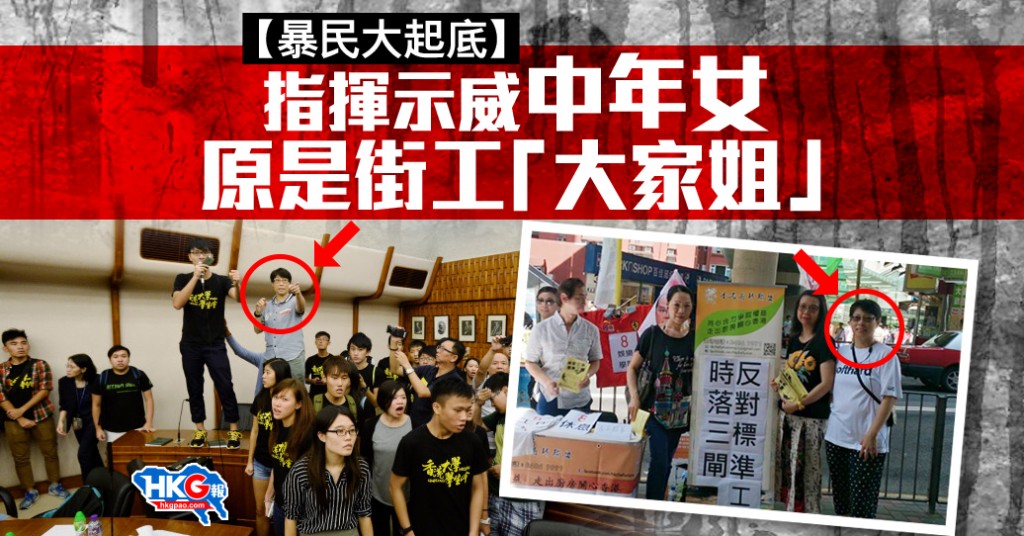
According to East Week, the middle-aged
woman who jumped on top of the podium next to HKU Student Union president
Billy Fung to harangue the university council members is not a HKU
alumnus. On that evening, she ranted like a rabid dog, saying that the
university council members "wasted the taxpayers' money" and "clueless."
When Dr. Lo Chung-mo fell down injured, she called him "acting" and "puk
kai." She even started to curse the students, which was enough to make
people wonder whether she was mentally ill.
Over the past year, this "Big Sister" has
participated in many street actions. For example, on the day before Occupy
Causeway Bay was cleared, she delivered a speech. On April 4, she spoke at
the Shopping Revolution. This year at the July 1st march, she held a Hong
Kong Restaurant Cooks Alliance banner. It turns out that the Hong Kong
Restaurant Cooks Alliance is closely connected with the political party
Neighbourhood and Worker's Service Centre led by legislator Leung
Yiu-chung.
- (SCMP)
Students' behaviour at HKU council meeting abhorrent. By Y.L. Lee. August
5, 2015.
The students' siege of the University of
Hong Kong Council meeting on July 28 has attracted considerable public
attention.
As an alumna, I found the students'
violent disruption of the meeting and the delaying of the injured being
sent to hospital for treatment abhorrent.
The council is the legitimate body to
take the decision on the matter of the appointment of the
pro-vice-chancellor. So long as it has duly followed the prescribed rules
of procedures in the conduct of its business, it is not up to anyone to
interfere with its work, be it students, staff, alumni or politicians.
This is a proper way to respect
institutional autonomy since the council is the supreme governing body of
the university. Students can stage protests or sit-ins to express their
dissatisfaction with council decisions, but they should not take such
uncivilised action as to storm a meeting.
What exactly did they want to achieve?
Does it mean that any time people make decisions with which they do not
agree, they should react by barging in to stop proceedings?
If individual council members seek to
exert pressure on the council by promoting the views of outside
individuals/groups to reverse the corporate decision to be made, how can
governance work effectively?
The uncivilised actions of the students
that night were deplorable. I understand that it is difficult for people
to remain rational when they were in a highly charged situation, and that
when a big crowd gathers, things can easily get out of control.
It was, however, very disturbing to me
when the student leader, Billy Fung Jing-en, tried to rationalise the
students' behaviour, which led to a delay for injured people to be given
proper treatment, by saying that they had no other options but to storm
the meeting.
I am deeply disappointed with this lack
of ability to practise some critical self-reflection - a basic attribute
which any responsible member of society should have.
The bedrock of a civilised society is
respect for the law and due process. If we stop the proceedings every time
people made a decision with which we do not agree, what kind of a world
will we live in?
If as adults we breach the code of what
is acceptable behaviour, we should admit our wrongdoing and rectify it,
but not try to find excuses for that behaviour.
- (YouTube)
https://www.youtube.com/watch?v=vcHWgf_3U6Q Videos of politicians
involved in harassing the university council members.
0:01 Legislator Ip Kin-yuen said that
they will be responsible for their actions and methods.
0:24 Female voice: "Lo Chung-mo!" Group chant: "Shameless!"
0:30 Civic Party member and ex-legislator Tanya Chan holding the
microphone and leading the chant
0:40 League of Social Democrats vice-president Ng Man-yuen, Civic Party
member and legislator Alan Leong.
0:47 Civic Party members Tanya Chan and Dennis Kwok
1:05 Alan Leong leading chant of "Lo Chung-mo" and group chanting
"Shameless!" as Lo Chung-mo is being put into the ambulance.
1:14 Alan Leong on radio: "The students, all the adults, need to be bear
responsibility for their own actions."
1:32 Civic Party member and legislator Audrey Eu standing, smiling and
watching Ayesha Macpherson being prevented from leaving.
(YouTube)
https://www.youtube.com/watch?v=9AEDUDBCM1c On dbc radio with Audrey
Eu.
0:16 Radio host: ou were at the parking
garage that day when Ayesha Macpherson wanted to leave. It was reported
that you chanted slogans about being "Shameless!" Did you chant them?
0:27 Eu: I did. I chanted them. Yes.
0:35 Radio host: When you yelled "Shameless!", you target must be
Macpherson, right?
0:36 Eu: I believe that the targets are all those who voted to maintain
the same position, not Macpherson alone.
0:44 Radio host: But only Macpherson was there. Did you know how
Macpherson voted? You don't know.
0:46 Eu: I guessed it. Of course, it was a secret ballot.
0:47 Radio host: You just guessed. So why was she shameless?
...
1:00 Eu: Secondly, I saw two doctors at the scene. One of them was Dennis
Kwok. He was at the same floor as I was. At the time, I told him to go and
offer assistance. Those who held microphones. There were not many of them.
Those who held microphones all wanted to help.
1:23 (video of persons holding microphones) Tanya Chan leading the chant
of "Shameless!" with her microphone
1:45 Eu: Right now, many people like to come out and discuss the so-called
violence, or maybe about some assaults, or maybe whether someone is faking
an injury. This is one week later already. It took place last Tuesday.
Today, you are still asking me the same question. I am worried that the
focus of the entire matter is not on whether the university should follow
due process.
2:11 Subtitle: "She took part in the incident but now she wants other
people not to discuss it anymore. Does she want people to shift focus?"
- (dbc)
August 7, 2015.
Hong Kong University Student Union
president Billy Fung Jing-en said that the students still disagree with
waiting for a Provost to be hired before appointing the Pro Vice
Chancellor. However, upon reflection, they believe that charging into the
university council meeting room has caused the matter to lose focus. In
future, the Student Union may not be using the same method to express its
view. He did not respond directly to the question about an apology from
the students. He only said that he felt sad about the incident.
Internet comments:
- Billy Fung has got me totally confused.
First he justified what the students did by saying that they were "using
force to stop violence." Next, he said that the thugs who surrounded the
university council members were not students. Now he says that the
students may not be using this method in the future. So what is the
really deal?
- This is microcosm of Occupy Central.
First, when they did it, they thought that they had righteousness on their
side. After they find out that public opinion was surely and inexorably
against them such that the original goal was completely lost amidst
criticisms of the tactics. In the end, thought, they still refused to say
sorry.
- As the students said to Ayesha
Macpherson, "You can leave if you kneel down and apologize." So Billy Fung
must kneel and apologize.
(Wen
Wei Po) June 30, 2015.
Three men and one woman were
charged with interfering with police duties in Yuen Long on March 1. According
to Chief Inspector Chan Ka-po, he observed four individuals dashing onto the
roadway, including the 14-year-old male student, 20-year-old Kwong, 22-year-old
Poon and 30-year-old clerk Ng. So he went up to stop them. The first defendant
charged him on his left chest with the shoulder. Chan said that Kwong also
tussled with him while Ng used her chest to bump into Chan and then scream
"Police sexual molestation."
The defense claimed that the
medical report did not reveal any injuries on Chan's left chest. However, Chan
insisted that he sustained an injury which was not found during the exam. The
defense also said that Chan's hand touched Ng's left breast and that caused her
to scream "Sexual molestation!". Kwong went up to grab Chan's hand to free the
woman so he did not interfere with police duty.
Police sergeant Hung Kwok-kay said
that Poon pushed him and tried to pull an arrested man away. But the defense
said that Poon did not know that Hung was a policeman and he was just trying to
separate two people in a fight.
(Oriental
Daily) June 29, 2015.
Chan testified that he saw the 13-year-old student, Kwong and Ng
rushing onto the roadway. He intercepted them and asked them to return to the
sidewalk. Ng said: "What?" Chan thought that she couldn't hear clearly so he
repeated his request. The 13-year-old student rammed his Chan's left chest near
the police ID with the shoulder while saying, "What is not permitted?"
Chan said that he wanted to grab
the 13-year-old's hand to arrest. But Kwong came up and shoved both of his hands
away. Chan and Kwong tussled, such that Chan was spun around 180 degrees. At
that time, an unknown person hit Chan on his head and left forehead. Then Ng
thrust her breast at Chan and screamed "Police sexual molestation!" Someone else
echoed "Police sexual molestation." Objects were thrown. Chan fell onto the
ground and someone kicked him on the back. Chan got up and arrested the
13-year-old. At the hospital, Chan was found to have sustained injuries on his
right hand and left lower back.
(Apple
Daily) June 29, 2015.
According to Chief inspector Chan Ka-po, Ng had blood all over
her face because she started to bleed in the nose when she fell down and then
she used her hand to smear blood all over her face.
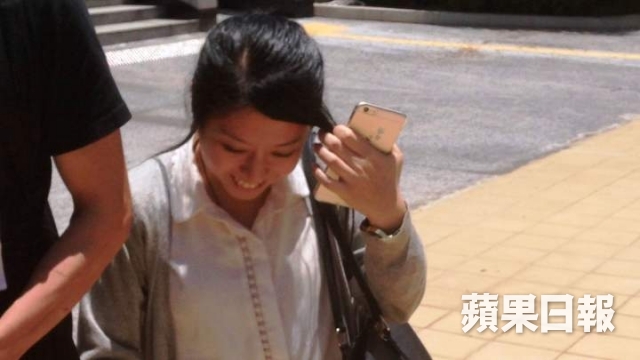
(Oriental
Daily) July 2, 2015.
30-year-old shipping clerk Ng testified in court
today. She said that she and her 20-year-old boyfriend Kwong went out to Yuen
Long to demonstrate on March 1. During the time, Kwong wanted to take out a
water bottle and drink bottle. The police instructed the crowd to advance and
she lost track of Kwong. She was pushed by the crowd towards the scene of the
clash. She said that the male Chief Inspector Chan Ka-po stuck his face close to
her forehead, grabbed her by the left shoulder strap of her backpack and touched
her left breast. She got afraid and screamed "Sexual molestation" while Chan
said: "Arrest her! Arrest her!"
Kwong appeared and also yelled
"Sexual molestation!" While Kwong and Chan tussled, the police used pepper spray
and pulled her and Kwong away. When they went back to find the mobile phone
which was dropped, a policeman tackled Kwong by the neck, while she was shoved
by someone from behind and fell on the ground. When she got up, she was bleeding
in the mouth and nose. At the hospital, she was found to have suffered a broken
nose. She does not know whether a policeman pushed her or not.
Under cross-examination by her
lawyer, she said that she listened to the legal advice of her volunteer lawyers
and have so far not lodged a complaint against Chief Inspector Chan for sexual
molestation. So far she has only told the Complaints Against Police Organisation
about being pushed onto the ground by a policeman.
The other defendant 22-year-old
Poon Tsz-heng said that he is presently a third-year Accounting student at City
University. At the time, he had just left from a friend's residence and he was
not part of the anti-parallel traders demonstration. He did not see the ID badge on
policeman Hung Kwok-kay. He thought that Hung was arguing and fighting with
another man over the parallel trading and therefore used his hands to separate
the two parties.
(SCMP)
July 30, 2015.
A female protester against
cross-border traders yesterday told her assault trial that a
police inspector touched her breast when he tried get hold of her
rucksack during a protest in Yuen Long.
Protester Ng Lai-ying, 30, said when
Chief Inspector Chan Ka-po stretched his arm to reach the strap of
the bag on her shoulder, his hand landed on the upper part of her
left breast. "I was so scared and I yelled 'indecent assault'
immediately," she recalled, of the moments after the March 1
incident.
Ng, who was arrested on the day,
denies one count of assaulting Chan, who made a counter-claim,
accusing Ng of using her breast to bump him.
A case against Chan was not
pursued, Tuen Mun Court heard, as Ng decided not to report the
alleged indecent assault to police after seeking legal advice from
the Duty Lawyer Service.
Conducting her own defence, Ng
told Deputy Magistrate Michael Chan Pik-kiu that Chan already had
his head leaned towards her forehead even before the alleged
incident, which took place on Sau Fu Street. She said after Chan's
alleged act, her co-defendant and boyfriend, Kwong Chun-lung, 20,
came to her rescue by grabbing hold of Chan's hand. But they were
hit with pepper spray used by Chan's colleagues.
The pair retreated a few steps
after being sprayed, she said, but returned a while later to
search for her mobile phone. Despite being permitted to return by
two police officers, they were still apprehended, during which Ng
sustained a broken nose after being pushed from behind.
Testifying earlier against the
pair and their two co-defendants, Chan claimed he was stopped by
Kwong when he tried to arrest a 14-year-old pupil, who was later
charged with assaulting Chan in the same case. Kwong faced one
count of obstructing Chan.
Another co-defendant, Poon Tsz-hang,
22 faced the same charge as Kwong, but involving a police
sergeant. All three co-defendants deny the charges. The case
continues on July 8.
(Oriental
Daily) July 16, 2015.
Today at Tuen Mun Court, the magistrate found the
first defendant 14-year-old Chu, the second defendant 20-year-old male Kwong,
the third defendant 30-year-old female Ng and the fourth defendant 22-year-old
male Poon guilty. The first and third defendants were charged with assaulting a
police officer, and the second and fourth defendants were charged with
obstructing or resisting a police officer. The magistrate found the testimonies
of the police officers to be credible whereas the defendants were not truthful
witnesses. In particular, the second and third defendants were lovers who
concocted the counter-charge that the police officer sexually molested the
female. The magistrate said that it was heinous for the female to concoct the
sexual molestation charge because of the potential harm to the reputation and
career of the police officer. The magistrate also condemned the second defendant
for adding his voice to the sexual molestation charge.
(TIME)
July 16, 2015.
A court in Hong Kong convicted 30-year-old Ng
Lai-ying Thursday of assaulting a police officer by hitting him with her
breast during a protest on March 1.
Ng testified that during the protest the
officer had reached out his arm to grasp the strap of her bag and that his
hand had come in contact with her upper left breast, the South China Morning
Post reports.
She told the court that she immediately
yelled, “Indecent assault!”
But in his decision, the magistrate rejected
those allegations, accusing Ng of lying in her testimony and instead finding
her guilty of using her breast to bump the officer’s arm. “You used your
female identity to trump up the allegation that the officer had molested you.
This is a malicious act,” he said.
There was no word on what physical injuries,
if any, the officer suffered.
(SCMP)
July 17, 2015.
A participant in a protest against
cross-border traders on March 1 was yesterday found guilty of assaulting a
police chief inspector by hitting him with her breast.
Tuen Mun deputy magistrate Michael Chan
Pik-kiu convicted Ng Lai-ying, 30, who works at a shipping company, of using
her chest to bump against the right arm of Chief Inspector Chan Ka-po - who
was trying to control the chaotic protest in Yuen Long that day.
A 14-year-old pupil whose name was not
disclosed in open court for legal reasons was also found guilty of striking
Chan in the chest with his shoulder while the officer was urging protesters
to return to the pavement from the roadway on Sau Fu Street. Ng's boyfriend,
Kwong Chun-lung, 20, and university student Poon Tsz-hang, 22, were each
found guilty of one count of obstructing police officers who were exercising
their duties.
All four defendants pleaded not guilty to
their charges.
During the trial, Ng said Chan stretched
his arm to reach the strap of the bag on her shoulder, and his hand landed
on the upper part of her left breast. She said she immediately yelled
"indecent assault".
But yesterday, after analysing the
evidence, the magistrate rejected her claims that the inspector had molested
her, and chastised her for making up the assault story. "You used your
female identity to trump up the allegation that the officer had molested
you. This is a malicious act," he said, adding that it had caused great harm
to the officer's reputation.
The magistrate noted that during his
one-year stint in Tuen Mun Court, he had handled numerous cases in which
defendants had assaulted other people who were exercising their duties,
including police officers and Correctional Services Department staff.
"Those who are attacked because of their
jobs should be protected," he said. He also affirmed that the role of police
in a protest was to maintain law and order. "There were two groups of people
expressing different points of view at the protest. Without police officers
there to maintain order, it is not surprising that there was commotion, or
even clashes."
All of the defendants, who will be
sentenced on July 29, were remanded in custody, pending a series of reports
to determine an appropriate punishment.
(Oriental
Daily) July 29, 2015.
The defendants' lawyer said that the second
defendant will be in his fourth year at the Hang Seng School of Management. If
sent to prison, the second defendant would be unable to complete his studies.
The defense also showed the video in which the third defendant was seen to
have been pushed by a policeman, which caused her nose bone to break. This
proves that the police treated her violently.
The fourth defendant's lawyer said that his
client was only visiting a friend nearby and tried to separate two men
fighting in the street. The fourth defendant had just graduated with an
accounting degree at City University. If convicted, his career may be
jeopardized. Therefore, the fourth defendant would like to receive probation,
fine or suspended sentence.
The first defendant hopes to be sent to
receive probation or fine only. The lawyer submitted letters from his parents,
his primary and second school principals to show that the first defendant is
excellent in character and scholastics, including being a volunteer for his
church.
(Hong
Kong Free Press) July 30, 2015.
A woman who was convicted of assaulting a
police officer with her breasts was sentenced to three months and 15 days’
imprisonment on Thursday morning. Thirty-year-old Ng Lai-ying was found
guilty of assaulting Chief Inspector Chan Ka-po by Tuen Mun Magistrates’
Court earlier this month. She returned to court on Thursday with three of
her co-accused who were also sentenced.
Twenty-year-old Kwong Chung-hung was
handed five months and one week in a rehabilitation centre, 22-year-old Poon
Tsz-hang was sentenced to five months and three weeks in prison, and
a 14-year-old defendant will also be sent to a rehabilitation centre for an
indeterminate period of time.
All four defendants pleaded not guilty to
the charges against them. Lawyers representing the four told the court they
would appeal the sentences and the defendants were granted bail.
The magistrate overseeing the case, Michael
Chan Pik-kiu, set bail conditions to HK$5,000 each and said that all four
defendants must not leave Hong Kong.
According to Stand News between 40 to 50
people turned up at the courthouse to watch the sentencing, including
members of Hong Kong Indigenous, a localist group spawned from last year’s
pro-democracy Occupy movement. As they left the courthouse, the three
defendants did not comment on the sentence but thanked everyone for their
support.
Nicknamed the “Yuen Long Four”, the
group were arrested after taking part in an anti-parallel trading protest in
Yuen Long at the beginning of March.
Ng was found guilty of thrusting her chest
into Chief Inspector Chan’s arm as he was attempting to control the
increasingly rowdy protest. Ng told the court that she shouted “indecent
assault” after Chan reached out for the strap of her bag, leading his hand
to touch the upper part of her left breast.
Kwong and Poon were found guilty of
obstructing police officers and a 14-year-old pupil was found guilty of
hitting Chan in the chest with his shoulder.
Local media reported that magistrate Chan
dismissed Ng’s allegations, saying they had caused great harm to the
officer’s reputation. Chan also revealed that after the Yuen Long Four
were convicted he was threatened and feared for his safety, However, he did
not make clear who had threatened him and why.
The ruling made international headlines and
also saw 200 people assemble outside the High Court on Sunday, July 26 to
protest against the convictions.
(SCMP)
Civil disobedience has its consequences. July 31, 2015.
Civil disobedience by definition breaks the
law. It may be for a good cause but don't be surprised if you get dragged
into court and thrown into jail. Do the deed, pay the price. That's how you
gain respect; it's certainly not by moaning about it. Yet, many young
protesters today seem surprised when they find themselves before a judge;
their supporters are outraged.
Deputy Magistrate Michael Chan Pik-kiu has
been the target of abuse in court and on the internet ever since he
convicted a group of anti-parallel trade protesters for assaulting or
obstructing the police. Among these are Ng Lai-ying, convicted of assault
and jailed yesterday for three months and 15 days; her boyfriend Kwong
Chun-lung, 20, was sentenced to a training centre, while Poon Tsz-hang, 22,
was given five months and one week in jail, after both were convicted of
obstructing police.
A 14-year-old boy, who was also convicted
of assault, was sentenced to a rehabilitation centre.
The defendants have been granted bail to
file for appeal.
Sympathetic commentators have ridiculed
Ng's conviction for assaulting an officer with her breast, conjuring images
of her using her sensitive parts to beat up the hapless officer. But the
judge has made it clear the seriousness of her offence was that she falsely
counter-accused the police inspector of indecent assault.
Classic civil-disobedience activists accept
the consequences of breaching the law, however bad, by taking the
punishment. Through their suffering, they expose the illegitimacy of the law
and the state that administers it.
Many young protesters today hold no such
belief. They do not think they should suffer any consequences, even if they
confront and fight police officers, break into private and closed-door
meetings and hound whoever disagrees with them. Take those student
protesters who effectively hijacked a University of Hong Kong Council
meeting this week. They seem to think they are above the law.
There are many liberal or pan-democratic
politicians and commentators who encourage or even glorify those youthful
protesters.
When you think you are right, you don't
need to listen to anyone else. Anything you do is justified.
(EJinsight)
July 31, 2015.
For
sheer preposterousness, nothing tops it. There’s a close second if you like.
But as a judicial precedent, an assault conviction on the basis of the use
of a woman’s breasts as a weapon turns the legal system on its head.
That’s
exactly what happened when a Hong Kong magistrate found a woman guilty of
assaulting a policeman with her breasts during a chaotic protest earlier
this year.
Ng
Lai-ying, 30, was sentenced to three months and 15 days in jail. That she
was convicted on such a ridiculous charge is laughable enough but it’s
incredibly appalling when you look at the evidence.
While
the victim failed to reasonably prove the extent of his injuries, Ng was
shown in photos and video clips with a bloodied mouth being manhandled by
policemen. Even assuming her injuries did not happen at the exact same time
she attacked the policeman, it almost told you who was beating whom.
Deputy
magistrate Michael Chan said the verdict is a warning against “humiliating”
policemen in the future. Which would have made sense if that, in fact, was
the case.
The
incident happened during a chaotic dispersal of an anti-parallel trading
protest in Yuen Long that was marred by scuffles, meaning there was a fair
amount of pushing and shoving.
If
anyone was shamed, it was Ng who suffered from the notion that her breasts
were big and powerful enough to be an assault weapon. There’s a sense Ng’s
attempt to hit back by accusing the policeman of indecently assaulting her
helped do her in.
In any
event, Hong Kong people were aghast at the verdict. The world was bemused.
The news caught fire on the internet and the international media, including
Time magazine, picked up the story and ran with it.
Chan
has become famous for the wrong reasons, but the biggest joke is on Hong
Kong’s vaunted rule of law and justice system which have just become the
laughing stock of the world.
(SCMP)
July 31, 2015.
A woman convicted of assaulting a police
chief inspector with her breast in a protest against cross-border traders,
maintained her innocence in a mitigation session attended by many of her
supporters yesterday.
Ng Lai-ying, 30, instructed her lawyer
Lawrence Lau Wai-hung to tell Tuen Mum Court that a report sought on her
earlier had erred in suggesting she admitted the offence after being
convicted.
Normally, a magistrate or judge would take
into account such an admission when considering the sentencing options. But
Lau told Deputy Magistrate Michael Chan Pik-kiu: "Ng insisted that she had
not committed the offence. She wanted to retain her integrity rather than
lie ... in exchange for a lighter sentence."
Dozens of supporters - including members of
Hong Kong Indigenous and lawmaker "Long Hair" Leung Kwok-hung - poured into
the courtroom to support Ng and her co-defendants. Some had to wait outside,
forcing the court to keep its doors open throughout the hearing. At least 20
police officers, in uniform and plain clothes, stood outside the courtroom.
Ng was found guilty last month of
assaulting Chief Inspector Chan Ka-po, after the magistrate ruled she used
her chest to bump against Chan's arm in Yuen Long on March 1. A 14-year-old
boy was convicted of assaulting Chan in the same trial. Ng's boyfriend,
Kwong Chun-lung, 20, and student Poon Tsz-hang, 22, were each found guilty
of one count of obstructing a police officer.
The court heard during the trial that Ng
suffered a fractured nose after being subdued during the protest.
Lau yesterday showed the court video
footage that captured what appeared to be a police officer in uniform
pushing Ng from behind. He asked the magistrate to consider the Ng's injury.
Earlier, the magistrate said Ng was
malicious in accusing Chan of indecent assault. Lau said the incident was
not premeditated, nor did it damage Chan's reputation in the police as Ng,
whom Lau described as a "decent woman", did not make a complaint.
Lau urged the magistrate not to send Kwong
to a detention centre as it would ruin the university student's future.
Senior counsel Martin Lee, who mitigated
for Poon and the 14-year-old on a pro bono basis, asked the magistrate to
consider the boy's well-being and not to deprive him of his liberty.
(Oriental
Daily) July 31, 2015.
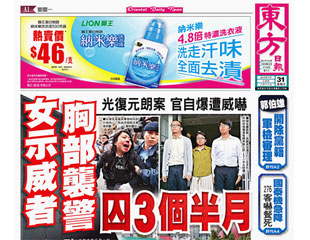
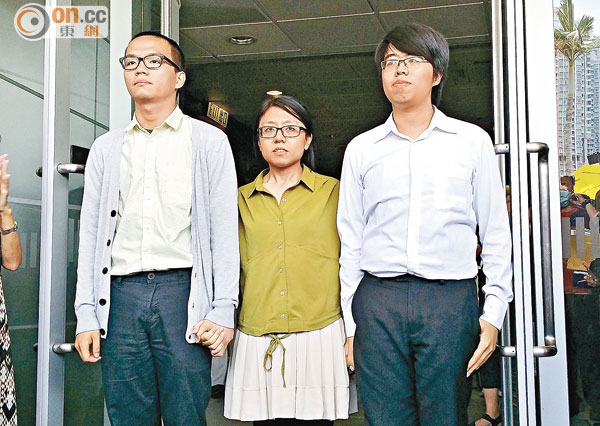
Poon Tsz-hang, Ng Lai-ying and Kwong Chun-lung
According to magistrate Michael Chan Pik-kiu,
chief inspector Chan Ka-po was not injured. However, Ng Lai-ying thrusted her
chest onto Chan's arm and then screamed "Police in sexual molestation!" This
caused other protestors to yell and toss objects around. What had been a minor
assault has escalated into a serious matter. Therefore the magistrate
sentenced Ng to 3-1/2 months in jail.
The magistrate said that an unknown person
kicked Chief Inspector Chan Ka-po who was on the ground. The defendant Poon
Tsz-hang then pulled the attacker away from the grasp of the police, thus
enabling the attacker to escape. Therefore, this act was more serious than the
regular obstruction charge (such as refusing to be searched or to produce an
ID for inspection). The magistrate sentenced Poon to 5 months plus one week.
The magistrate said that the sentences were lightened in view of the records
of the two defendants.
The magistrate said that the defendant Kwong
Chun-lung obstructed Chief Inspector Chan from arresting Ny Lai-ying, causing
Chan to be hit in the head and kicked on the back by unknown persons.
Therefore, he sentenced Kwong to a rehabilitation centre. As for the
14-year-old student who used his shoulder to ram Chief Inspector Chan, he has
been arrested four times since late December and charged twice (including this
case). The magistrate said that his parents are unable to keep him control.
"Even if it was wrong to have arrested/prosecuted/sentenced each time, I
believe that his parents wouldn't want to see their son go through this
process." Therefore, the magistrate sentenced the defendant to a
rehabilitation centre.
(Oriental
Daily) July 31, 2015.
During the sentencing of the Yuen Long Four,
the magistrate Michael Chan Pik-kiu disclosed that he had received threats.
The police has received information that someone had posted at the discussion
forums: "I know where you (Michael Chan Pik-kiu) hang around, and is
investigating this as a case of criminal threat.
After the sentencing was made, a number of
other comments were made at the discussion forums, including some that were
directed at the family of Chan, such as "Your entire family will surely die."
Over at Passion Times, the banner said: "No use to say anything, more
practical to take action" and "Hong Kong traitor magistrate Michael Chan
Pik-kiu, watch your step!"
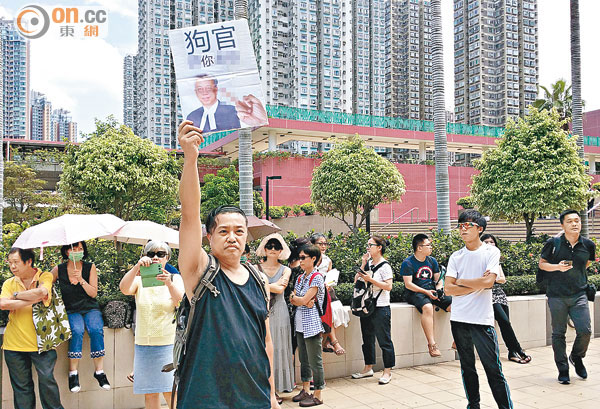
Protestor outside courthouse holding sign: "Dog
official: fuck your mother!" over the photo of the magistrate Michael Chan
Pik-kiu
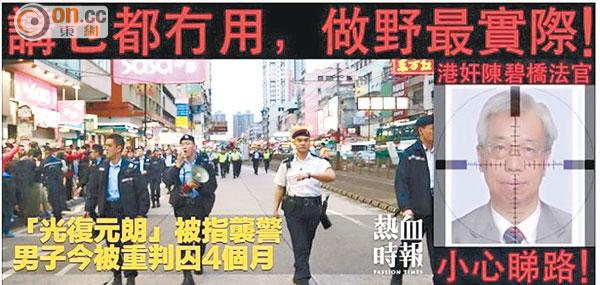
Passion Times:
No use to say anything, more practical to take action
Photo of Hong Kong traitor magistrate Chan Pik-kiu
Watch your step!
(EJinsight)
July 31, 2015.
Film and TV actress Gloria Yip has launched
a campaign to protest the conviction of a woman for assaulting a policeman
with her breasts. Yip wants people to upload pictures with a “Breast X
Weapon” hashtag on the internet, according to Stand News. She said she is
protesting the “weaponization” of the female body and wants the notion
expunged from its new legal definition. Yip said she has received support
from netizens who have started posting messages on Facebook.
A women’s advocacy group, Association
Concerning Sexual Violence Against Women, said it is concerned the decision
will deter victims of sexual violence from seeking help from the police.
Ng Lai-ying, 30, was found guilty of
assaulting police chief inspector Chan Ka-po by hitting him with her
breasts. She was jailed three months and 15 days. Chan said Ng attacked him
with her breasts while photos and video clips showed her with a bloodied
mouth. Ng accused Chan of indecently assaulting her. Magistrate Michael Chan
said Ng’s yelling, which incited others to join, along with the throwing of
objects at police officers, made the assault more serious than it was.
(SCMP)
August 1, 2015.
Not holding placards – but bras – some 200
protesters rallied outside the police headquarters in Wan Chai this morning
against the conviction of a woman who was earlier jailed for three and a
half months for assaulting an officer with her breast.
Protesters feared the conviction could
deter women from joining future social movements because of concerns that
police would charge them with assault whenever there is bodily contact
during a demonstration.
Ng Lai-ying and three other defendants who
took part in a protest against cross-border traders in March were granted
bail last Thursday pending an appeal, as the police started to investigate
allegations that the magistrate who convicted them had been threatened.
Deputy magistrate Michael Chan Pik-kiu said
although the police inspector assaulted by Ng had not suffered any injury,
Ng’s attempt to accuse the inspector of molesting her made her case serious.
“Breast is not a weapon,” the protesters
chanted while holding actual bras and pictures of the underwear amid a heavy
police presence.
The rally organiser, called Breast Walk,
said it felt “helpless” over the conviction as it was “ridiculous” for the
police to turn a deaf ear to Ng’s claim that she was molested by an
inspector during the protest. “It is very shocking and regrettable that a
woman’s allegation that she has been molested is turned into her causing
chaos. It would deter women from taking part in social movements and
deprive them of the right to participate in political activities,” said Luk
Kit-ling, a spokesman for the group.
Regardless of whether they were male or
female, some demonstrators wore bras on their chest to show support for Ng.
They included social worker Jordi Tsang Sing-cheung, who said: “The way I
dress today looks quite ugly as a male, but it is not as ugly as the
judgment, which is like calling a deer a horse.” Ng was wearing a bra made
of coconuts.
Before the rally began, police raised a
yellow banner warning protesters it was an unlawful assembly and they could
be prosecuted. But the warning was ignored. The protesters left peacefully
after handing a petition to a police representative.
(Oriental
Daily) August 1, 2015.
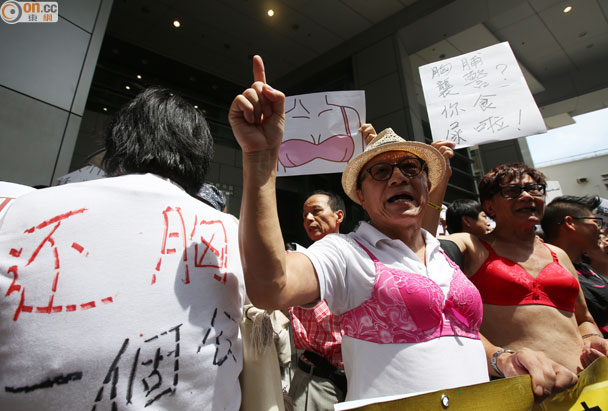
More than 100 protestors showed up outside
Hong Kong Police Headquarters in Wanchai for the "One person one bra, no
gender difference, wear them and show them, give justice back to the breast"
campaign. Some of these demonstrators are worried that once the precedent is
set, women's right to participate in civil rights action will be deprived.
(SCMP)
July 13, 2016.
A police
chief inspector who accused a woman of assaulting him with her breast in a
high-profile trial that drew international media coverage last year inflated
his claims, the woman’s lawyer told an appeal on Wednesday. But a
counterclaim that the officer had molested the woman was also described as
“bizarre” by the prosecution.
Barrister Lawrence Lau
Wai-chung, for Ng Lai-ying, told the High Court that despite being the
number two in command at a protest in Yuen Long against cross-border traders
on March 1 last year, inspector Chan Ka-po testified earlier that he decided
to face the three defendants, including Ng, “alone for five minutes”. This
happened even though many police officers were stationed at the scene, a
video played to the court showed.
Lau said he brought
the point to the attention of then deputy magistrate Michael Chan Pik-kiu
during the trial, asking whether it was not possible for the inspector to
call reinforcements. “Law enforcers exaggerating their claims can be a very
destructive weapon,” he said, asking Madam Justice Judianna Barnes to quash
Ng’s conviction.
Ng, 30, was found
guilty last year of assaulting the inspector by using her chest to bump
against Chan’s arm. A 14-year-old boy was also convicted of assaulting Chan
in the same trial. Ng’s boyfriend, Kwong Chun-lung, 20, and student Poon Tsz-hang,
22, were each found guilty of one count of obstructing a police officer. Ng
was sentenced to three months and 15 days in jail. She was released on bail
pending the appeal.
On Wednesday, Barnes
said she noted from media reports that public opinion seemed to have been
asking why Ng was found guilty, even though it looked as if she was the one
who was indecently assaulted. Ng also accused the inspector of molesting her
during the trial. The news made international headlines, followed by a
subsequent local protest with demonstrators sporting bras to proclaim
“breasts are not weapons”.
Lau said this was not
his case as he clarified that anyone could assault others with any part of
their body in the context of law. But prosecutor Anna Lai Yuen-kee argued
that Kwong had fabricated the sequence of events relating to the encounter
between his girlfriend and the inspector.
Kwong caught hold of the officer’s left hand,
instead of his right hand that was alleged to have been touching Ng’s
breast, the prosecutor noted. “That’s unreasonable,” Lai said. It would be a
bold move if the inspector, under the watchful eye of so many people, dared
touch a woman, she added.
Barnes reserved
judgment in the appeal case.
(Hong
Kong Free Press) July 13, 2016.
Four anti-parallel protesters found guilty of
police assault and obstruction – including a woman was said to have attacked
a police officer with her breasts – appeared before the High Court on
Wednesday morning to appeal the conviction and sentence. One of the defendants
has asked to submit a new video clip to the court.
Thirty-year-old Ng Lai-ying and her three
co-accused, nicknamed the “Yuen Long Four,” were arrested after taking part in
an anti-parallel trading protest in Yuen Long at the beginning of March last
year.
Four anti-parallel protesters found guilty of
police assault and obstruction – including a woman was said to have attacked a
police officer with her breasts – appeared before the High Court on Wednesday
morning to appeal the conviction and sentence. One of the defendants has asked
to submit a new video clip to the court.
Thirty-year-old Ng Lai-ying and her three
co-accused, nicknamed the “Yuen Long Four,” were arrested after taking part in
an anti-parallel trading protest in Yuen Long at the beginning of March last
year.
At the High Court on
Wednesday morning, the youngest defendant, now 15-years-old, made a request to
submit new footage to the court.
Barrister Randy Shek, representing the
defendant, said that the new video clip clearly shows what happened on the day
of the incident, and that it differed from how it was described in two
officers’ testimonies.
When asked why the video was not submitted to
the court last year, Shek said that following the ruling, many members of the
public helped look for the clip, and the one which they wish to submit was
found by the first defendant’s father, Sing Tao Daily reported.
The Honourable Justice Madam Barnes said that
the case had caused public uproar, with many pointing out that Ng had
initially accused the officer of indecent assault and saying that it was not
possible to assault a police officer using breasts. However, the judge said
that if the attack was hostile, it was not impossible under the law.
Barrister Lawrence Lau Wai-chung, who
represents Ng and Kwong, agreed that it was not impossible for breasts to be a
weapon, but Ng said that witnesses exaggerating their testimonies was a more
deadly weapon and questioned why the first instance judge did not deal with
the inconsistencies in the two officers’ statements, Ming Pao reported.
Judge Barnes said that she will take a look
at the new clip before determining whether it can be submitted to court.
The defendants have been released on bail
pending appeal.
Barrister Randy Shek,
representing the defendant, said that the new video clip clearly shows what
happened on the day of the incident, and that it differed from how it was
described in two officers’ testimonies.
When asked why the video
was not submitted to the court last year, Shek said that following the ruling,
many members of the public helped look for the clip, and the one which they
wish to submit was found by the first defendant’s father, Sing Tao Daily
reported.
The Honourable Justice
Madam Barnes said that the case had caused public uproar, with many pointing
out that Ng had initially accused the officer of indecent assault and saying
that it was not possible to assault a police officer using breasts. However,
the judge said that if the attack was hostile, it was not impossible under the
law.
Barrister Lawrence Lau
Wai-chung, who represents Ng and Kwong, agreed that it was not impossible for
breasts to be a weapon, but Ng said that witnesses exaggerating their
testimonies was a more deadly weapon and questioned why the first instance
judge did not deal with the inconsistencies in the two officers’ statements,
Ming Pao
reported.
Judge Barnes said that
she will take a look at the new clip before determining whether it can be
submitted to court.
The defendants have been
released on bail pending appeal.
(SCMP)
August 29, 2016.
A Hong Kong woman convicted of using her
breast to assault a policeman at a protest against mainland parallel traders
last year failed to clear her name yesterday, but may avoid going to jail.
Ng Lai-ying, 30, guilty of assaulting Chief
Inspector Chan Ka-po, successfully appealed against her jail sentence of three
months and 15 days. But she failed in her attempt to overturn her conviction,
which earlier drew a great deal of press coverage worldwide.
The court will look into her suitability for
community service, but she may still go to prison.
Handing down her written judgment, Mrs
Justice Judianna Barnes wrote it appeared Ng was trying to get lover Kwong
Chun-lung off the hook when she bumped Chan with her breast and yelled
“indecent assault” during the protest in Yuen Long on March 1 last year.
“Although her action could not be said to be excusable, the court should
consider it was under this circumstance that she committed the offence,” she
continued.
But the judge noted that the offence remained
serious in that she falsely accused Chan of indecent assault, which could have
incited the crowd. She warned Ng that if she failed to display remorse, she
may still face a jail term.
Kwong, 20, who was earlier found guilty of
obstructing Chan, also successfully overturned his original sentence of time
at a training centre, but not his conviction. A probation officer’s report has
been sought on him.
Outside the High Court, Ng gasped: “I was
relieved.” She and Kwong said they both respected the court’s decision.
Poon Tsz-hang, 22, and an unnamed 15-year-old
boy, also failed to clear their names, but successfully appealed against their
custodial sentences. All will be sentenced on September 26.
During the trial, the Tuen Mun Magistrates’
Court heard the boy was the first to bump the inspector with his shoulder on
the road at Sau Fu Street. Kwong obstructed Chan when he tried to stop the
inspector from catching the boy.
Chan accused Ng of assaulting him by bumping
him with her chest and yelling “police indecent assault”, when she tried to
make Chan let go of Kwong.
The case made international headlines, and
women’s rights protesters took to the streets to express their bewilderment as
to how Ng could have used her breast as a weapon.
Anger at parallel traders ran high last year
in districts near the border as mainlanders used multiple-entry visas to bring
goods, such as baby milk formula, home to sell at a profit. It caused crowding
and shortage of the goods, sparking a wave of protests.
The teenager convicted of assaulting Chan was
sentenced to time at a rehabilitation centre, but will now be assessed by a
probation officer. University student Poon was originally given five months
and a week in jail for obstructing a police officer, but a community service
report was ordered on him too.
All were granted bail.
Internet comments:
- (RTHK)
Democratic Party legislator James To Kun-sun: "Anyway, if you use any part
of your body to ram the other party, this is a form of assault on that other
party. The gender of the individual does not matter. The specific part of
the body does not matter. The present case has a gender aspect. If a man
thrusts his chest against a woman or a man, it is easy for everybody to
accept. Given that you rammed that other party, you have committed assault.
But this time it was a woman. But from the legal point of view, it makes no
difference whether it was a man or a woman."
- The verdict/sentence was rendered in a
court by a magistrate. These protestors showed up outside Police Headquarters.
Do they know the difference between the court and the police? The principle of
the separation of powers?
- You don't understand, do you? The relevant court is located in Tuen Mun,
which is about one hour away by MTR. Besides, the courthouse is closed on
Sunday. Meanwhile, Police Headquarters is located in the middle of Hong Kong
Island, convenient to reach by the MTR and the bus services, and it is open seven days a week. Get it?
- Where was Occupy Mong Kok cross-dresser
Ah Kay on this
day? I can't spot him. It seems that there was only the regular group of
protestors (Leung Kwok-hung (League of Social Democrats), Tanya Chan (Civic
Party), Han Lian-shan (professional protestor), etc) who show up for any cause
just for the sake of protesting.
- Occupy Central marshal Kwok Siu-kay
carrying weapon of mass destruction:
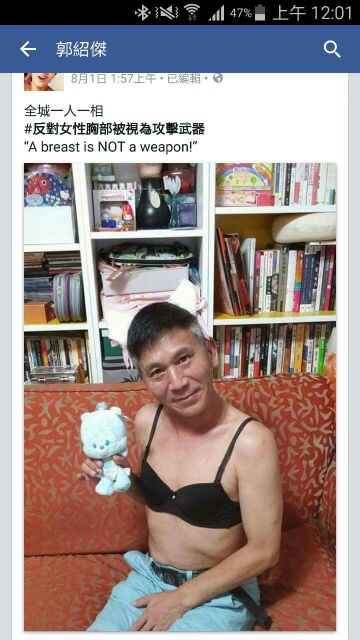
- News reports said that tens of dozens of
organizations were present to protest. Well, in Hong Kong, each person
represents multiple organizations (such as XYZ Concern Group, etc). For
example, legislator Leung Kwok-hung represents the League of Social Democrats
as well as the April 5th Movement. It is better to say tens of dozens of
organizations than to say tens of dozens of individuals.
- The listed organizations include the Female Social Workers' Union, Women's
Political Participation Network, New Women Progressive Club, Social Workers'
Renaissance Movement, University Gay/Lesbian Action, Hong Kong Lesbian
Association, League of Social Democrats, Confederation of Labor Unions, etc.
- I am very disappointed. I wanted to see
Chrissie Chow

Instead all I got was Leung Kwok-hung.
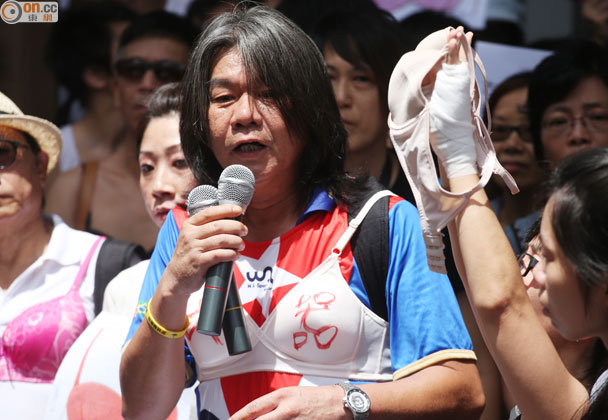
(SCMP)
Hong Kong woman convicted of assaulting police officer with her breast
deserves to be jailed. By Alex Lo. August 4, 2015.
A breast is, of course, not a weapon. And
nowhere in the conviction and sentencing of anti-parallel trading protester
Ng Lai-ying does it say it is.
So the pro-breast rally on Sunday which
attracted about 200 protesters - both men and women - wearing bras in
support of Ng against the sentencing magistrate had me scratching my head.
I am glad, though, that the rally gave an
opportunity for cross-dressers and transvestites to come out in support of a
political cause.
The chatter on internet forums frequented
by activists has been full of outrage and anger.
The proximate cause was that Ng was jailed
for three-and-a-half months for assaulting a police officer with her breast,
pending an appeal, while anti-Occupy newspaper vendor Yiu Yau-pik was
ordered yesterday by a judge to perform 120 hours of community service for
throwing an egg at lawmaker "Long Hair" Leung Kwok-hung.
Where is the justice, many asked?
One angry post said Yiu's was the more
serious of the offences, and if anyone deserved to go to jail, it's not Ng
but Yiu. After all, the post went on, the egg did stain Leung's T-shirt
while no officers were harmed by Ng's breasts.
I would rather ask: where's the injustice?
120 hours of community service for the common assault of throwing an egg?
That's a pretty stiff penalty, just one notch short of being sent to jail in
Hong Kong's sentencing guidelines.
Our pan-democratic lawmakers pioneered and
perfected the protest art of throwing objects at opponents in and out of the
legislative chamber. Leung simply got a taste of his own medicine.
Assault legally means the application of an
unlawful force, which does not have to cause physical injury. The latter
offence is assault causing bodily harm and there are the more serious
offences of wounding and wounding with intent.
Ng was found guilty of assaulting a police
officer, which usually comes with a jail sentence. She did so by pressing
her chest against the officer's arm, and, as the presiding magistrate
observed, falsely shouted indecent assault against him, thus further
provoking the protesting crowd around her.
She got what she deserved.
(Hong
Kong Free Press) September 26, 2016.
A woman who was jailed for three-and-a-half
months for assaulting a police officer with her breasts has had her sentence
reduced to 200 hours of community service.
Ng Lai-ying, 31, was arrested during an
anti-parallel trading protest in March last year. She was found guilty of
assaulting Chief Inspector Chan Ka-po by thrusting her chest into his arm as
he was attempting to control the demonstration.
Judge Judianna Barnes, said at the High Court
on Monday that she based the decision on the fact that Ng demonstrated “good
conduct,” and her boss said she was responsible and reliable.
Poon Tsz-hang, 23, who was convicted
of obstruction, was also given 200 hours of community service upon appeal. He
was originally sentenced to five months and one week.
Ng’s boyfriend Kwok Chun-lung, 21, and a
15-year-old boy were given a one-year probation order. They were ordered to
serve at a detention centre and rehabilitation centre respectively.
Videos:
[The video below was offered by Ng Lai-ying to
mitigate her case, but the action for which she was charged with assault took
place earlier in the day. Therefore the video is not direct evidence for the
trial.]
dbc news video:
https://www.youtube.com/watch?v=X9xWwltW6Y8
Apple Daily news video:
https://www.youtube.com/watch?v=-tdJ9g5YrFw
Mat Kit:
https://www.youtube.com/watch?v=WefmzbmhdP4&
dbc news video:
https://www.youtube.com/watch?v=PcIA8Fdtr_w Press conference after
sentencing.
Taiwanese Animators:
https://www.youtube.com/watch?v=JB4ZKRxzz3U
Conan O'Brien:
https://www.youtube.com/watch?v=qmE-eETXSa8
Conan O'Briend
https://www.youtube.com/watch?v=jYJKtLUTdXI Debunking the act with the facts
of the case
Internet comment:
- The technique of women throwing their bodies at
men and screaming "Sexual molestation" is time-honored, well-established.
Here is this May 2013 video of
Federation of Students demonstrators:
https://www.youtube.com/watch?v=UJXYdirwsDY.
6:11 Male student in grey t-shirt shoves female student in white t-shirt towards
a uniformed policeman in a human chain. High-pitched female shrieks.
6:55 Female student in black t-shirt keeps pushing policemen, shrieking and
filming with one hand.
7:57 Male student applies bear hugs to two female students. Female screaming:
"Sexual molestation."
9:11 Female student elbows female police officer in chest and the latter
tumbles down.
https://www.youtube.com/watch?v=dR_Z3mBTg8A
As another example, here is Legislative Councilor
Tse Wai-chun being accused by Lam Yi-Lai for sexual molestation. The evidence?
At 0:40, Lam thrusts her chest at Tse and there was physical contact.
https://www.youtube.com/watch?v=75zEDEQ2MB0
This technique is not an exclusive right for
democrats. Here is Legislative Councilor Leung Kwok-hung being harassed by a
woman at a campaign rally.
https://www.youtube.com/watch?v=TMSrXFXz4os On January 25, 2015, Mong Kok
Shopping Revolutionaries were confronted by two Blue Ribbons. It begins with
verbal insults from both sides. Then there is some physical jostling. The two
Blue Ribbons are the middle-aged men dressed in black. The others are
pro-democracy Yellow Ribbon Shopping Revolutions.
02:38 (Woman) Fuck your mother's stinking cunt.
02:58 [The two men turn and leave]
03:11 [A man in white jacket and hat gives a shove in the back]
03:13 (Man in blue) Don't fucking leave! Fuck your mother's stinking cunt!
03:24 (Woman bumps the Blue Ribbon man with her chest) I fuck your mother!
03:26 [Woman bumps the Blue Ribbon man with her chest again]
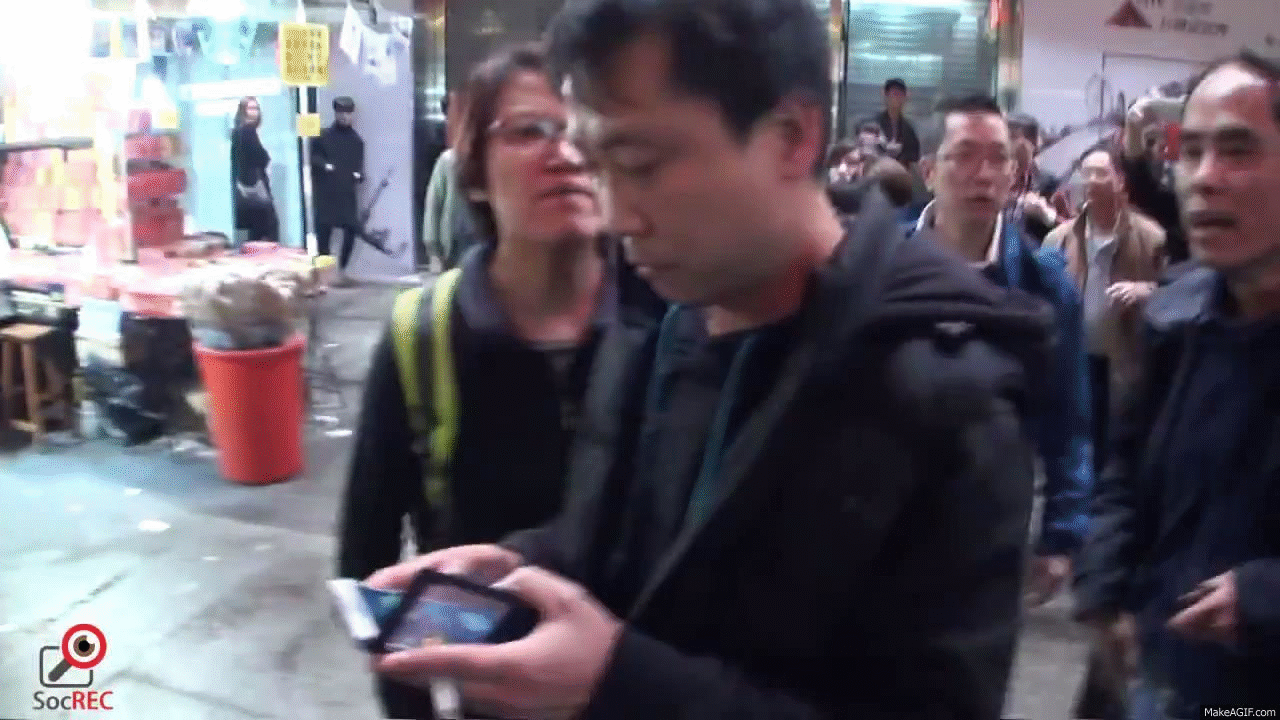
03:30 [A man in blue sweater and blue-grey cap shoves the other Blue Ribbon man
from behind towards the woman]
03:31 (Woman) Sexual molestation! Sexual molestation! Sexual molestation! Sexual
molestation!
03:38 [An old man with white hair, black jacket and orange t-shit underneath
punches both Blue Ribbon men]
03:46 (A man called out the two Blue Ribbon men) You are hitting people! You are
hitting people!
04:01 (Woman) He sexually molested me! He sexually molested me!
04:18 [A Yellow Ribbon man punches the second Blue Ribbon from behind on the
back of the neck]
04:27 [The fight spills into The Body Shop. A man in military pants slams the
second Blue Ribbon man from behind onto the floor and holds him in a lock.
04:54 [Another Yellow Ribbon man grabs the first Blue Ribbon man by his jackets
and yanks his jacket away. The Blue Ribbon man falls to the ground ]
04:59 [While the Blue Ribbon man is on the ground with his jacket pulled over
this head, a Yellow Ribbon man hits with a folded beige-colored umbrella.]
05:09 (Man in blue) Call the police.
05:09 (Female shop assistant) Call the police.
05:16 [The old man kicks the second Blue Ribbon who is being held on the ground,
then stoops down ready to punch.]
05:28 (Yellow Ribbon in military pants) I don't care. Anyway, he sexually
molested someone ... I saw you.
05:57 (Yellow Ribbon to second Blue Ribbon man) Are you human? How can you
sexually molest someone?
05:59 (Another Yellow Ribbon) The police have been called. No need to worry.
06:05 (Another Yellow Ribbon) The crime of sexual molestation. This one, this
one.
06:10 (Man in grey jackets) These two are thieves. They were stealing things.
06:18 (Another Yellow Ribbon) This one. This one. The man behind caught him.
06:30 (First Blue Ribbon Man) We are not going to leave.
- For the n-th time, let it be said that the case is
not about using the breast to assault a policeman. The basis for the case is
this:
According to magistrate Michael Chan
Pik-kiu, chief inspector Chan Ka-po was not injured. However, Ng Lai-ying
thrusted her chest onto Chan's arm and then screamed "Police in sexual
molestation!" This caused other protestors to yell and toss objects around. What
had been a minor assault has escalated into a serious matter. Therefore the
magistrate sentenced Ng to 3-1/2 months in jail.
The severity of the sentence is based upon several
considerations, such as the seriousness of the charge, the seriousness of the
consequences of the act, the history/background of the defendant, etc.
As for the possibility that the female was really
molested by the policeman ... well, this was daytime and there were several
hundred "photojournalists" present at the scene. A policeman would know that
anything that he does will be filmed by multiple cameras. So would the Chief
Inspector Chan Ka-po place his career at risk to molest Ng Lai-ying (see photo)?
Is it worth it (that is, is Ng Lai-ying as beautiful as
Shailene Woodley?)? Please make some sense.
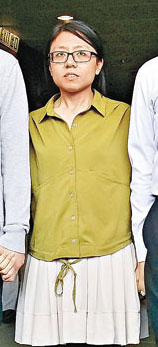
For example,
EJinsight: "Ng Lai-ying, 30, was found guilty of assaulting police chief
inspector Chan Ka-po by hitting him with her breasts. She was jailed three
months and 15 days. Chan said Ng attacked him with her breasts while photos and
video clips showed her with a bloodied mouth. Ng accused Chan of indecently
assaulting her. " That is just plain wrong.
"Magistrate Michael Chan said Ng’s yelling, which incited others to join, along
with the throwing of objects at police officers, made the assault more serious
than it was." That is correct.
- (Oriental
Daily) September 26, 2016. Judge Judianna Barnes said that it was not
impossible either for Ng Lai-ying to deliberately thrust her breast at the chief
inspector or for the chief inspector to molest Ng in broad daylight. Overall,
the judge said that the magistrate has the right to listen to both sides and
then rule against the defendants. Therefore, the judge rejected the appeal
against the verdict.
Yes, anything is possible. And pigs will fly.
- (Oriental
Daily) Normally the Civic Party regards themselves as the guardians of
the rule-of-law, and will oppose any criticisms of judicial rulings and
decisions. In the case of the Yuen Long Four, they have suddenly gone completely
silent about the insults and threats being hurled at magistrate Michael Chan
Pik-kiu. The fact of the matter is that the Civic Party are terrified of
offending the radical elements. Thus, "silence is golden."
- (Hong
Kong Free Press) Judge Judianna Barnes, said at the High Court on Monday
that she based the decision on the fact that Ng demonstrated “good conduct,” and
her boss said she was responsible and reliable.
Ha ha ha! How many letters of good conduct would you
like me to produce? It seemed all the rioters are able to produce testimonies
from pastors, priests, teachers and other bleeding-heart liberals.
(SCMP)
Chief executive as chancellor of Hong Kong universities is an anachronism. By
Alex Lo. July 13, 2015.
In some overseas universities, the
president or chancellor is the nominal head with little or no
executive influence. Their power and role are mostly confined to
hobnobbing with wealthy and powerful donors and alumni to raise
money and profile for their schools.
So even if they are politically
connected or hold high office, they are disinclined to interfere
with their schools' autonomy and freedom. This model has many
advocates but is far from being the universal norm.
Hong Kong's case is somewhat in
the middle, but it is politicised enough to generate the current
row over allegations of political interference at the University
of Hong Kong.
The laws that set up our eight
publicly funded tertiary institutions made the colonial governor,
and after 1997, the chief executive, their chancellor. The
vice-chancellors are the real executive heads of their
universities. But the chief executive-cum-chancellor may still
exercise indirect influence by nominating a large number of allies
- in some cases, up to half - to the universities' councils, their
powerful decision-making bodies.
Controversies ensued earlier this
year with the naming of executive councillor Professor Arthur Li
Kwok-cheung, a politically divisive figure, to the HKU council.
His allied council members' stalling of the appointment of a
pro-democracy legal scholar, Professor Johannes Chan Man-mun, to a
pro-vice-chancellor post renewed the row.
Chan's case is, however,
complicated by his being tainted by alleged mishandling of dodgy
donation funds channelled to the university by his colleague and
Occupy Central co-founder Benny Tai Yiu-ting.
It's over Chan's stalled
appointment that many student unions and scholars are now
campaigning to change the laws that automatically make the chief
executive their chancellor.
Chan's case is murky and so has
clouded the debate. The real issue is clear-cut enough: should the
future chief executive continue to be the universities' chancellor
and wield the power to name so many council members?
This has become an anachronism.
There is no reason why persons of high moral, social and/or
academic standing should not become chancellors of our public
universities. And even if the chief executive has to remain the
nominal head, his or her power to name council members should be
significantly curbed.
(EJinsight)
HKU alumni to hold protest over pro vice chancellor issue. July 28, 2015.
Dr.
Leong Che-hung, chairman of the Council of the University of Hong Kong (HKU),
said he was willing to initiate a discussion of the council’s decision to
delay the appointment of a pro vice chancellor in a meeting scheduled for
Tuesday, Ming Pao Daily reported. However, it is not clear if the council
would discuss the issue.
A
group of HKU alumni said it has gathered 2,600 signatures for a petition
letter urging the council to stop deferring the appointment of former law
dean Johannes Chan as pro vice chancellor. Members of the group also plan to
stage a silent protest on the campus and hand their petition letter to
members of the council. As of Monday morning, the concern group has
solicited the signatures of 1,536 alumni, 909 supporters and 20
organizations.
The
signatories include former chief secretary Anson Chan, former security chief
Peter Lai Hing-ning, businessman Lew Mon-hung, and Zandra Mok, former
political assistant to the secretary for labor and welfare.
The Hong Kong University Students Union (HKUSU)
said some 50 to 60 members will surround the venue of the council meeting
and demand that the council disclose their discussions during the meeting.
The HKUSU said it would not rule out further action should the outcome of
the meeting fail to satisfy them.
Kevin
Lau, a former Ming Pao editor and HKU alumnus, had earlier accused Leung
and fellow council member Arthur Li of lobbying against Johannes Chan. Leung
denied the allegation, and said he regretted that such a rumor had
circulated.
(SCMP)
HKU council members taken to hospital as meeting on pro-vice-chancellor post
descends into chaos. July 29, 2015.
A closed-door meeting of the
University of Hong Kong’s governing body ended in chaos last night when
angry students stormed the venue upon learning that members were sticking to
their guns in deferring the appointment of a liberal scholar to a key
managerial post.
HKU council member Dr Lo Chung-mau,
one of those who supported the controversial deferral, collapsed in the
middle of the shouting and shoving in the overcrowded room. It was unclear
whether he fainted or was pushed to the ground.
An ambulance was called to take him
to hospital, but the university said it was blocked at the entrance of the
car park for more than 30 minutes.
Another council member, Ayesha Macpherson,
was also sent to hospital after complaining of feeling unwell when she could
not drive out of the car park. Protesting students complained that there
were six police vehicles in the car park and officers were already equipped
with warning flags that are normally used at violent confrontations.
“I respect the students’ passion, but we
need to resolve the matter rationally,” said embattled council chairman Dr
Leong Che-hung. “We wanted to work out an appointment schedule and we had
many proposals for that – but now we can’t proceed.”
But Billy Fung Jing-en, president of
HKU’s student union, said: “We suffered from the violence of the system and
we came up with this idea to make our voice heard. Why are there police
waiting for us?” Fung added that he
would like to wish Lo a speedy recovery.
The trouble began at 9.25pm, when
dozens of angry students waiting outside the meeting room forced their way
in after finding out the council had already voted down a motion, proposed
by staff and student representatives, to “revisit” the appointment issue
after it was deferred last month.
Students and pro-democracy figures
have complained of political interference in the delayed appointment of
liberal scholar Professor Johannes Chan Man-mun as a pro-vice-chancellor.
Chan has been recommended for the
post but has yet to be confirmed – his supporters are convinced it’s because
of his pro-democracy views and close ties with his colleague, Benny Tai Yiu-ting,
who co-founded last year’s Occupy Central movement.
Council members in favour of the
deferral say it’s an administrative issue, not a political one, and they
want to wait for a supervisory post to be filled first.
“Appoint now!” the students chanted
last night at the disrupted meeting, refusing to let council members leave.
They shouted “shame” at Arthur Li
Kwok-cheung, directing much of their anger at the executive councillor who
was appointed by Chief Executive Leung Chun-ying to HKU’s governing body. Li
has been accused of working behind the scene to block Chan’s appointment,
but last night he denied allegations that he had arranged for a middleman to
dissuade Chan from accepting the post. “Students don’t like me maybe because
I’m appointed by Leung Chun-ying and they don’t like him,” Li said,
describing their radical action as “Hong Kong’s Cultural Revolution”.
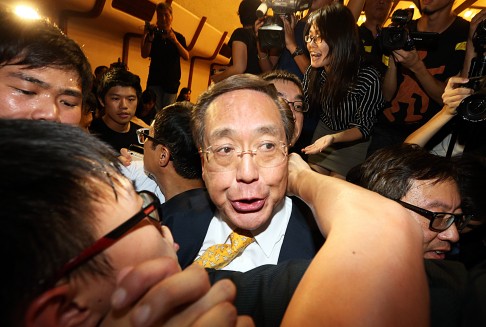
The students shouted 'shame' at Arthur Li
Kwok-cheung, appointed by CY Leung to HKU's governing body.
HKU president Professor Peter
Mathieson appealed to the protesting students to leave. “My primary concern
here reminds me of my concerns during the Occupy protest, which is the
safety of people,” he told them. “The point [you want] to make has been
made. I notice the strength of feelings.”
The chaos ended with another
closed-door meeting, this time between students, Mathieson, Leong and the
remaining council members.
Mathieson told the press he was a
“big believer in students having opportunities to express themselves and to
guarantee their freedom of speech”, although he told students that two
council members needing hospital treatment was not “good publicity” for HKU.
Having opposed the deferral, he said
he was still “very keen” to stay in his job and to assembling his team as
soon as possible. He said he was “very accustomed to political pressure”,
having spent 30 years in the publicly funded systems in health and
universities in Britain, which were also subject to such pressure.
“I feel all sorts of pressure in this
job, from staff, students, politicians, alumni. That’s my job. I’ll work in
the best interest of the university,” he said. He would not speculate on the
reasons for police presence — he said the university did not call for them -
and said it was “perfectly reasonable if they came to escort the ambulance”.
The Education Bureau condemned the
protest and urged people not to put pressure on the council.
But lawmaker Ip Kin-yuen, who leads
an alumni concern group demanding an end to the delay in appointing Chan,
said it was the council’s decision that had angered the students. “The
continuous delay hurts HKU more deeply. We shouldn’t lose the focus,” he
said.
Chan was shortlisted for the post, in
charge of academic staffing and resources, at the end of last year. But last
month, the council voted 12-6 to wait until a supervisory provost was hired
and gave his “input”.
(SCMP
TV) Hong Kong University students block council member Arthur Li
from leaving closed-door meeting (video)
(Oriental
Daily with video) July 29, 2015.
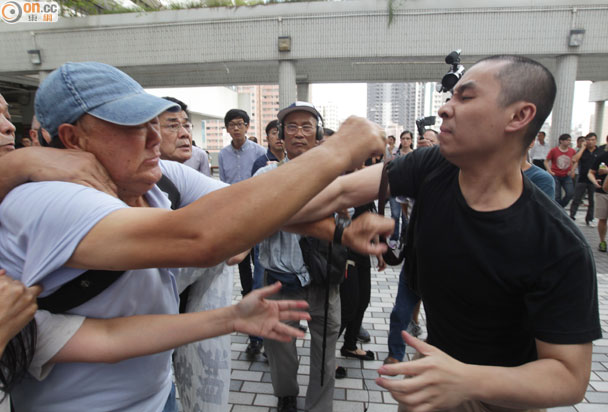
Yesterday around 30 HKU alumni went
to chant slogans such as "Protect HKU" and "Defend academic freedom".
Meanwhile about 10 "Value your children, defend education" members came to
counter-protest. These people said that they Hong Kong University students
take taxpayers' money but still want autonomy. If they took the money, they
should shut up and put up.
(Oriental
Daily) July 29, 2015.
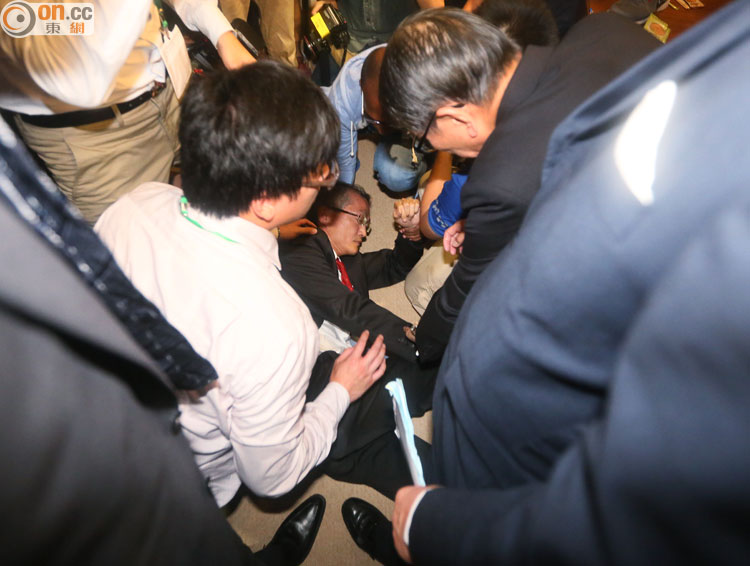
At around 930pm, about 100 HKU
students charged into the council meeting rooms and detained the council
members including HKU president Peter Mathieson, council members Arthur Li,
etc. During the chaos, council member Lo Chung-mo fell down. Council members
Arthur Li, Leong Chi-hung and Yuen Kwok-yung who are medical doctors tended
to Lo.
During this period, the students said
that the council members must retake their seats before they will allow Lo
to be taken to the hospital. Yuen Kwok-yung said that "You have to make way
for me to give emergency treatment." After more than 10 minutes, Lo finally
succeeded in leaving the council meeting room. Arthur Li returned to face
the students.
Another council member Wong Kai-man
was surrounded by demonstrators as he tried to leave. He was finally able to
leave in the company of security guards after 10 minutes. Another council
member Ayesha Macpherson was surrounded for more than 30 minutes. Seven
police officers came but she was still unable to leave. Finally, she felt
uncomfortable and was taken to Queen Mary Hospital by ambulance. Previously,
legislator Ip Kin-yuen had promised that they would intercept council
members downstairs and on the street.
As the ambulances for Lo and Mak
left, one of them was stopped by the students. The police came to escort the
ambulance away. According to information, the university did not report to
the police.
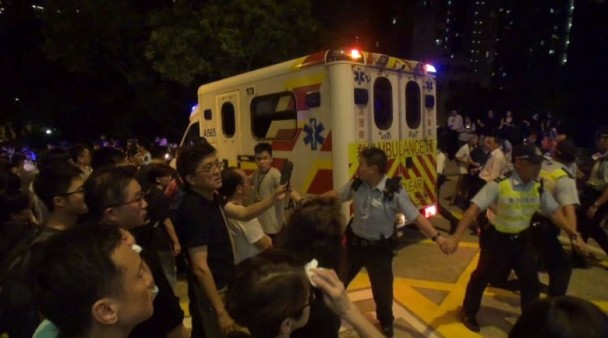
(Oriental
Daily) July 29, 2015.
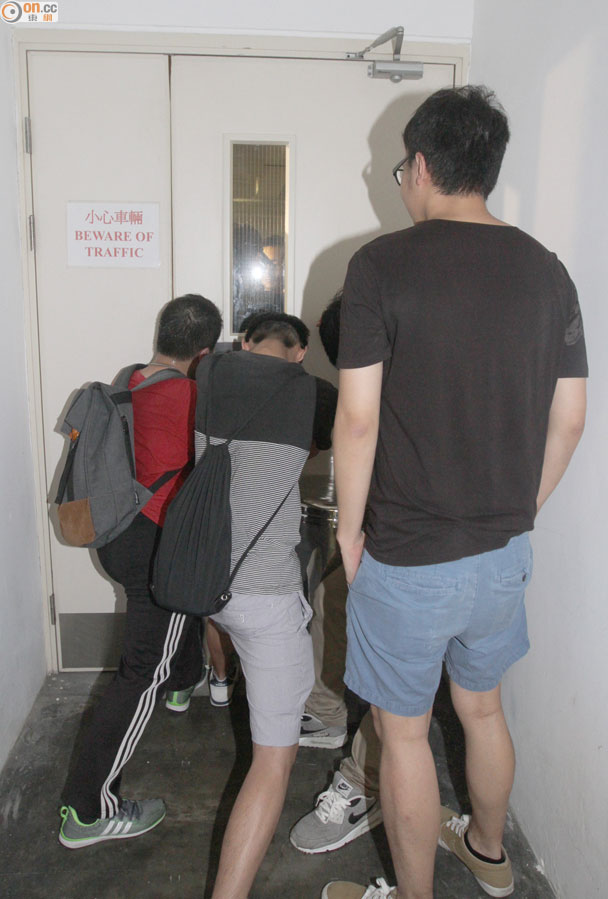
Students blocking the exits to prevent the
council members from leaving.
Internet comments condemned the
students for being "barbaric and rude." One wrote: "I remember that the
students once accused the police of blocking the backstairs to prevent them
from leaving. Today they did the same thing. They talk grand but they are
uncivilized all the same." Another questioned what these students would be
like once they leave school and enter society at large.
(Oriental
Daily) July 29, 2015.
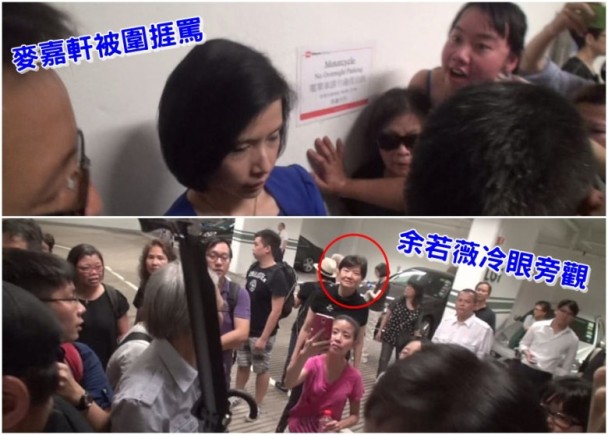
Council member Ayesha Macpherson was
surrounded by about 30 demonstrators as she tried to leave. The
demonstrators cursed Mak for being "shameless." They demanded that she
resign as council member. Meanwhile Hong Kong University alumnus, senior
barrister, Civic Party member and ex-legislator Audrey Eu stood on the side and watched the whole scene. The
demonstrators included a number of elderly persons (non-students).
(Oriental
Daily)
The students charged into the council
meeting room and prevented council members such as Arthur Li from departing.
Li said that the citizens can evaluate such actions. Li said that he was a
victim and that the students' actions constituted illegal detention and
mistreatment of senior citizens.
Did the students single him out? Li
said that the students probably thought that Li was appointed by Hong Kong
SAR Chief Executive CY Leung to control the university council. Li said that
there are 24 members on the university council and his one vote cannot sway
the decision of the council. Li said that nobody asked him about becoming
the council president, nor would he ask for the post.
Later, the students permitted Arthur
Li to leave. They told Li that since he is not a Hong Kong University
graduate, he should not be on the university council. They told him in
English, "You feel free to leave" implying that he should not come back or
else he would face another round of non-cooperative movement.
(Wen
Wei Po) July 29, 2015.
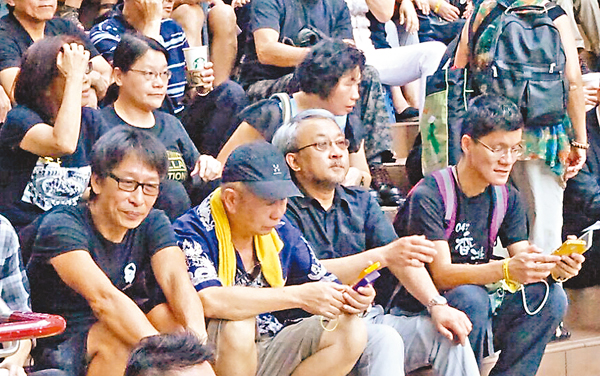
Prior to the Council meeting, a
number of opposition politicians saying that they represent HKU alumni
gathered outside Knowles Building to protest. These included Alan Leong,
Audrey Eu, Tanya Chan, Sin Chung-kai, Lee Wing-tat, etc. At the same time, a
number of Occupy Central radical activists also came to voice support. Our
reporter observed a number of individuals who occupied Tim Mei Road outside
the Legislative Council building after Occupy Central failed. These included
"Ah Lai" who is well-known for his connections to the radical groups People
Power and League of Social Democrats; Ray Wong who is the convener of Hong
Kong Indigenous. Other opposition figures said that these people have no
ties to Hong Kong University. "They are not HKU alumni, and they have no
existing ties to HKU. For example, Ray Wong is a graduate of the Caritas
Bianchi College of Careers, and his group Hong Kong Indigenous has no ties
to HKU. These people are here to exploit the situation."
Our reporter observed that these
radical elements came and mixed in with the rest of the protestors to chant
slogans. According to informed sources, they were not interested in
protesting a university council meeting until they learned that the Hong
Kong University Student Union said on Monday that they may even occupy the
meeting room. Then they rushed out to exploit the possible chaos.
Prior to the meeting, 20 members of
the Internet group "Value your children, defend education" came to
demonstrate. When they tried to submit a petition to the university staff,
they were surrounded by members of the HKU Last Line of Defence, and cursed
with "Fucking die quickly!" and "I have purchased a coffin for you already!"
A self-proclaimed Hong Kong University alumnus punched a 60-year-old man,
causing him to bleed all over his face. Group member Mrs. Chan said that
when her children attended HKU, they got good jobs after they graduated, but
nowadays HKU students only do politics: "They don't want to study; they only
want to mess with the university president."
(TVB)
July 29, 2015.
Legislator and HKU Last Line of
Defence Ip Kin-yuen said that those people who surrounded the council
members in the parking lot were not Hong Kong University students. "Last
night, the students were mostly inside and outside the tenth floor
conference room. The people downstairs were not students. Among the general
public, it is hard for us to tell who is who. As to whether they acted
appropriately, I think that they can judge for themselves. It is preferable
for them to explain themselves and then society can judge." Ip Yin-yuen said
that he respected what the Hong Kong University Student Union did. As
adults, they are responsible for their own actions.
(SCMP)
Students should leave Hong Kong University affairs to its council. July 30,
2015.
The generals fired the first salvos. The
foot soldiers moved in on Tuesday night. Audrey Eu Yuet-mee and Alan Leong
Kah-kit were among pan-democratic leaders who joined a signature campaign
against the delayed appointment of former law dean Johannes Chan Man-mun as
pro-vice-chancellor of the University of Hong Kong.
On Tuesday night, student protesters
stormed a meeting of the university's governing council on the matter. Chaos
followed; one professor - Lo Chung-mau - was sent to hospital.
The row yesterday wasn't about whether Chan
was fit for the job, or whether the administration of Leung Chun-ying was
trying to manipulate the outcome through council member Arthur Li Kwok-cheung,
a former education minister. It was over whether the unfortunate don was
hurt by protesters or feigned his injury.
A storm in a teacup over a politically
neutral post - with such exciting duties as budgeting research and hiring
academic staff - has turned into a farce.
Once you have the rival pan-democratic and
leftist camps locking horns, facts and other relevant issues are out the
window. It's now a shouting match. The pan-dems and the students want Chan
in and Li out. The leftists such as Beijing mouthpieces Wen Wei Po and Ta
Kung Pao want it the other way. Some students and university staff are
planning a vote of no confidence in Li. Both sides accuse the other of
interference.
Such are the students who hounded their
former vice-chancellor Tsui Lap-chee until he left without seeking another
term because of his oversight over security arrangements during a state
leader's visit to campus.
Interesting priorities: they had no qualms
getting rid of one of the world's great geneticists, but fight over a
relatively minor appointment for a local legal scholar whose work and
administrative skills are, to say the least, not universally admired.
Let me make a novel suggestion. Have a look
at the council members' list. Li notwithstanding, you have members who are
student leaders and staff reps as well as independent professors, a top
journalist and business figures who may be from the establishment but are
hardly pro-Leung.
Let them sort it out. It's their job, not
yours.
Videos:
-
(SocREC)
Two students argue with a "Value your children, defend education" member
-
(SocREC)
"Value your children, defend education" members demonstrate in Hong Kong
University. Megaphone shouting.
-
(SocREC)
Fascinating documentary about the state of democracy in Hong Kong. Lots of
yelling between demonstrators on both sides. At 9:37, a man fell to the
ground as if he was hit by a truck.
-
(SocREC)
Starts with boxing match.
-
(DMHK)
Footage of Lo Chung-mo falling down.
-
(DMHK)
Extended coverage of HKU students stopping the council members from leaving
-
(dbc)
Demonstrators obstruct Lo Chung-mo from getting on the ambulance to leave
-
(Salute
to HK Police) Video of suspected attacker of Lo Chung-mo
-
(Cable
TV) Students charge into the council meeting room
-
(Cable
TV) Two university council members prevented from leaving
-
(TVB)
The police took down a statement from Lo Chung-mo about an assault. With
respect to the allegations that he was faking it, Lo Chung-mo said that this
is an insult. He said: "I fell down after someone kicked me in the right
knee." He said that he did not see the perpetrator. "The doctor has just
finished his examination. My right knee is swollen and bruised. I feel a lot
better after taking some medicine. It is more painful yesterday. It hurts
less now. I don't want to comment (on the students' actions). I want the
public, the alumni and the university make their comments first."
HKUSU president Billy Fung said that the system forced them to do so: "We
did not damage a single brick. The University Council refused to listen to
the students for months. The opinion of the broad masses of the students
could not be heard within the system. We did this after we suffered from the
violence of the system. We want the university to listen to our opinion."
Fung also said that he does not understand why the police came on campus.
The police said that a security guard called them because someone was
blocking the entrances/exits to the university.
Legislator Ip Kin-yuen of the HKU Alumni Concern Group said: "I think that
every alumnus present at the scene felt the anxiety and anger, therefore it
is understandable that we feel this way. As for what they did and whether it
was the right timing or method, I think that they can judge for themselves.
It is better that they explain themselves and then society can judge."
-
(The
Epoch Times) Footage of Lo Chung-mo falling down.
-
(The
Epoch Times) Arthur Li unable to leave.
Internet comments:
- Did they say that the radical
elements came to exploit the chaos? But I don't see Captain America Andy
Yung waving the British Dragon-Lion flag for Hong Kong independence, or Ng
"Capone" Ting-Pong beating up policemen, or Eric "The Painter" Poon
molesting under-aged girls.
- Beating up senior citizens and
bullying children are the forte of the Hong Kong Localists. Of course, they
flee when the South-east Asians show up.
- Actually, they call "999" for police assistance.
- (Speakout
HK @ YouTube)
0:15 (Radio host) Your first issue is about the appointments made by CY
Leung. Do you know how many university council members are appointed by CY
Leung?
0:21 (Billy Fung, Hong Kong University Student Union president) There are
six plus one. That is to say, six council members are nominated by CY Leung.
The University Council chairman is also appointed by CY Leung.
0:31 (Radio host) But if you checked, CY Leung has actually appointed only
one (university council member).
0:34 (Fung) Oh, I know, I know. That is to say ... maybe ... maybe ... or
perhaps I ... to be exact ...
(Explanation) The Hong Kong SAR Chief
Executive can appoint six council members plus the chairman. However, five
of those six plus the chairman were appointed by former Chief Executive
Donald Tsang Yam-kuen and their terms have not ended yet.
- (RTHK)
When Hong Kong University Student Union president Billy Fung Jing-en was
asked whether he opened the door to let the student enter the meeting room,
he replied that the university campus belongs to the students. Therefore,
there is no place that the students cannot go.
Relevant
video
of Billy Fung making his famous statement.
- Unfortunately, there are
still places that some of those students can't go; namely, mainland China
because they don't have valid "Return
Home Cards". So if the University Council decides to hold its
meetings in Shenzhen, there won't be any protestors to harass them.
- Really? Here is a list of places
on campus that students can now go at will.
--- Male students can enter women's restrooms and vice versa.
--- Male students can rape women and vice versa.
--- Students can enter the Bursar's Office and open the locked safe.
--- Students can open up the ATM machines and take the cash.
--- Students can enter the Records Office, rifle through the files and
read/alter student grades (their own and others).
- This is a perfect exhibition of
Occupy Central logic from Hong Kong University students (see
Alex Chow On The Record):
"The problem is that you are saying
that the roads belong to the Occupy people. I want to fight for civil
nomination, I want to fight for democracy. Therefore I occupy the road."
This becomes: "The problem is that you are saying that the university
facilities belong to the students. I want Johannes Chan to become the pro
vice-chancellor. Therefore I occupy the meeting room."
- Hong Kong belongs to the people
of Hong Kong. But the People's Liberation Army has a garrison in
Admiralty. Let's see if you can enter the barracks at will.
- (dbc
@ YouTube)
0:01 (Radio host) Yesterday did you deliberately open the door to let the
students in during the break?
0:06 (Hong Kong University Student Union president Billy Fung) The students
decide on what they do or not do. I went to use the restroom because of a
natural physical urge. This is a mass movement. Right? Also, the
masses/students decide on what they want to do.
0:20 (Radio host) If you use this kind of method to deal with appointments,
your ties ...
0:28 (sound of telephone being disconnected)
0:30 (Radio host) The phone is disconnected. It does not matter. Let us
continue our discussion. We tried to reach Billy Fung by phone, but nobody
is picking up the phone.
0:39 (Radio host) I am somewhat dissatisfied. Dissatisfied about what? First
of all, if you are in public service. No matter how late you worked last
night, if you promised the media, you should show up. I understand that he
is very tired. Secondly, he said that the actions of the individuals are not
his responsibility. As the Student Union president, it is wrong for him to
evade in this manner. Why? Because he is the Hong Kong Student Union
president and the people outside are his fellow students. If he doesn't feel
that he can direct those people outside, he should not have issued the call
for those people to wait outside.
Relevant
video
of how Billy Fung opened the door for the other students to rush in.
- (HKG
Pao) Ming Pao ex-chief editor Kevin Lau said that HKU Council member
Arthur Li asked Johannes Chan to take the job and then resign immediately.
The students surrounded Li and called him shameless. Now Johannes Chan has
come out to state that Arthur Li did no such thing. So what are the chances
that Kevin Lau and the students will apologize to Arthur Li?
- The more interesting aspect is that Johannes Chan said nothing when Kevin
Lau first made the accusation in the newspaper. Based upon Lau's
information, the students surrounded Arthur Li and cursed him. Arthur Li
told the students to check with Johannes Chan himself about whether this was
true. Only then did Johannes Chan come out and confirmed that Arthur Li did
no such thing. His excuse: he only wanted to maintain a low profile. Chan
said that someone on the University Council asked through a middleman for
Chan to withdraw, but that person was not Arthur Li.
- Today the students illegally
entered the meeting room, they prevented some of the university council
members such as Arthur Li from leaving and they interfered with the
ambulances carrying some council members who were feeling uncomfortable. But
the deepest impression on me is this short 8-second
YouTube clip of Arthur Li being followed by someone screaming: "Puk
gai
(Wikipedia)!
Arthur Li, you stinking puk gai! May your whole family be wiped out!"
It is sad to see this coming from university students.
- Hong Kong University is heavily
subsidized by the government. Therefore the government should have some
oversight as to what goes on over there. Of course, the HKU Last Line of
Defence group may feel differently. They can try to privatize the university and
reject all government subsidies, and then they can do whatever they want.
- The students think that Arthur Li
should leave because he did not graduate from Hong Kong University and
therefore should not be on the university council. Well, if that is the
criterion, then Hong Kong University president
Peter Mathieson should be the first to go because his degrees are
from London Hospital Medical College and Cambridge University.
- New motto for Hong Kong University:
"Tomorrow's waste products."
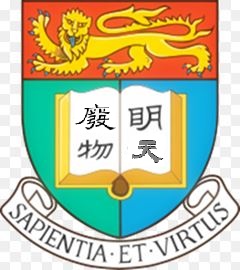
- The television news videos of last
night's incident will always be available to remind us that HKU = HK Ugly.
There was a time when a Hong Kong University degree will confer elite
status. This year, the Hong Kong University graduates will be facing a
challenge to get a desirable (or any) job based upon what happened during
Occupy Central and now we have this incident.
- The unnamed middleman who relayed
the message to Johannes Chan to quit is the same one who offered
$100 million to League of Social Democrats legislator Leung
Kwok-hung to vote for the constitutional reform proposal. They are anonymous
because they are fictional. Until the person is actually named, it will be
assumed to be fictional. And since Johannes Chan has a credibility problem,
he is unfit to become pro vice-chancellor.
- They are recycling the same old script. How about showing some creativity,
huh?
- This is the same old song. In June
of last year, protestors who opposed the Legco's budget allocation to
explore the development of North East New Territories broke the police line
to enter the Legco building. The incident led to much discussion, but about
the action and no longer about the underlying issue itself. At the time, a
number of pan-democrats immediately condemned the action.
Yesterday about 50 persons charged
into the conference room. Since Billy Fung had stated that this was an
option, the university council could have taken the necessary steps to stop
this. But they did not. While there is no direct evidence that this was
entrapment, the fact is that many members of the public are riled by the
action. Their disgust meant that they won't think any further about the
issue itself. This is the modus operandi of the CY Leung administration,
which has been successful each time. Young activists will be facing more of
the same in the future, so they need to figure out to deal with such
situations.
- Johannes Chan is the perpetrator of
the legendary
Hong Kong 818 incident.
On 16 August 2011 Li Keqiang began a
three-day visit to promote development between Hong Kong and Mainland
China.[1] His itinerary included promoting the inclusion of Hong Kong in
the Communist party 12th Five Year-Plan to promote financial co-operation.
Li said he came to Hong Kong to "walk around more, look around more and
listen more" (多走走、多看看、多聽聽) to the local people's concerns. He first
visited the Hong Kong Housing Authority headquarters and a centre for the
elderly to emphasise the overpriced housing market and ageing population
as the two top issues.
On 18 August, the last day of the
three-day visit, Li visited the University of Hong Kong as part of the
university's 100th anniversary celebrations. To provide security for the
event, the Hong Kong Police, led by Commissioner Andy Tsang Wai-hung,
assumed control of the school and created a core security zone that
prevented anyone from approaching Li.
During Li's visit, the school was placed
into lockdown by the police. Students and alumni were kept far away during
his visit. Three students who attempted to approach Li were blocked by
police and thrown to the ground:
Students involved in the incident: Wong
Kai-hing (黃佳鑫), of Hong Kong Polytechnic University Tang Kin-wa (鄧建華), of
Lingnan University Samuel Li Shing-hong (李成康) of University of Hong Kong
Samuel Li in particular was dragged off
and locked up in a staircase for an hour. According to Johannes Chan, the
Dean of the Faculty of Law at HKU, keeping the students in the zone
constituted false imprisonment and could be the basis for a civil suit
against the police.
(SKWMSEHK)
February 26, 2015.
In the Hong Kong 818 incident, Johannes
Chan jumped out to say that the circumstantial evidence exists for the
case of "false imprisonment" of the students by the police. He did this
before he got the facts. A
Hong
Kong University investigative committee established that Simon Li
Shing-hong had been free to leave anytime that he wanted.
Would Hong Kong University School of Law
ex-dean Johannes Chan care to comment on whether the circumstantial evidence
established that the students falsely imprisoned university council members
Arthur Li, Ayesha Macpherson and others?
- An analysis of the slogans held by the
Hong Kong University students:
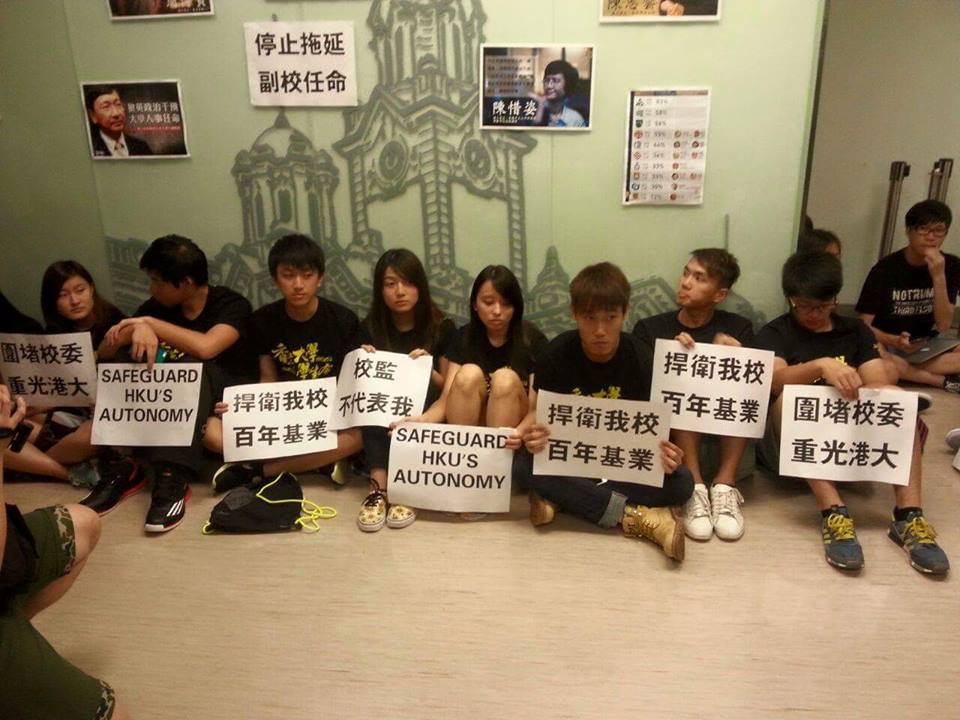
"Lay siege to the university council,
restore Hong Kong University": How does laying siege to the university
council members restore Hong Kong University? You have no goals, no
strategies, no tactics. You are just doing whatever it takes to get on
evening television news.
"Safeguard HKU's autonomy": As
legislator Ip Kin-yuen
said, those who surrounded the council members in the parking lot are
outsiders. Those people are definitely violating HKU's autonomy. You
should find out who they are and prevent them from getting on campus ever
again.
"Defend our school's century-long
accomplishments": Thanks to your activities over the past year, you have
destroyed the century-long foundation of the school. Who is going to hire
a HKU graduate given what they just saw on television? You are not
defending your school; you are destroying it.
"The chancellor does not represent me":
Indeed, the chancellor does not represent you; he represents the
university as a whole which is not just students but includes many more
others such as alumni, teachers, administrators and donors. Conversely, you represent yourself and you do not
represent the students or the university as a whole.
- (Oriental
Daily) July 29, 2015. Late last night, the Hong Kong
University Student Union sent a letter to the students. It said that its
actions "may be imperfect" but it refused resolutely to apologize. The
Student Union acknowledged that the action led to "no material gains" but
that doesn't mean that the resistance effort is finished. They urged the
students to resist together.
Well, it is one step forward for them
to acknowledge that there was no material gains. Occupy Central is still
declaring a glorious victory for the People.
(Oriental
Daily) July 11, 2015.
The Localists called for citizens
to chase the middle-aged Chinese female singers away from the Tuen Mun Town Park
this afternoon. The police put up a massive presence and
questioned/inspected/searched all those who appeared to be participants in the
event.
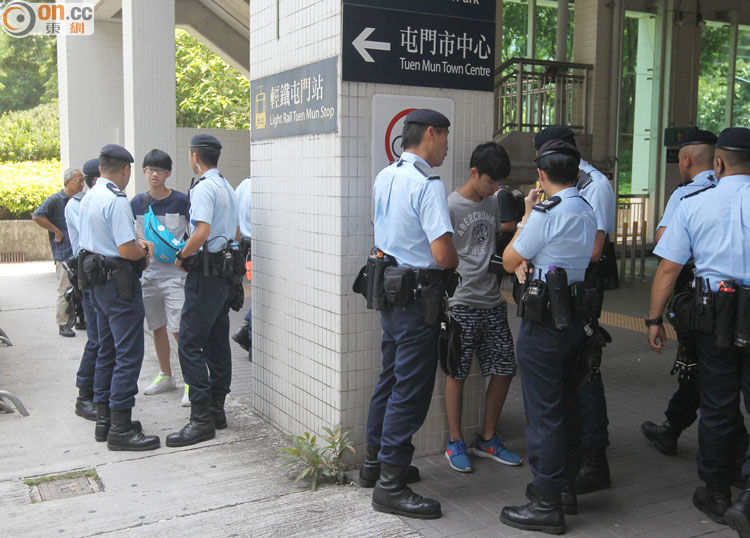
(Oriental
Daily) July 11, 2015.
About ten members of Love Hong
Kong set up a street booth on Sai Yeung Choi Street South, and were besieged by
about 30 members of Civic Passion and Hong Kong Indigenous Both sides screamed
at each other with megaphones. The police separated the two sides by iron
barricades and police line. Many stores were shuttered as a preventative
measure. At about 515pm, several members of Hong Kong Indigenous attempted
to charge the roadway, but the police stopped them.
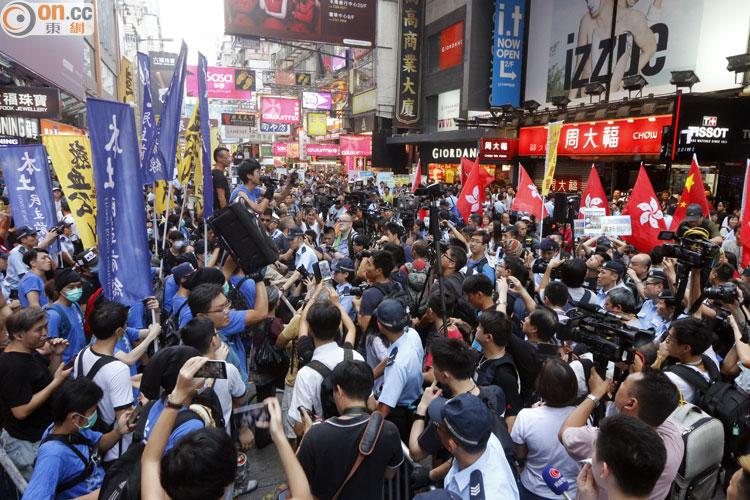
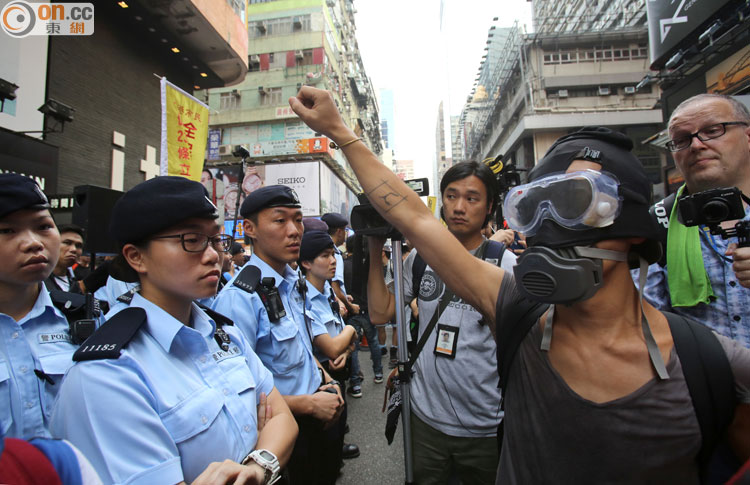
(Oriental
Daily) July 11, 2015.
At around 6pm, Love Hong Kong
finished its work and left. As the Love Hong Kong people began to pack up, the
Localists charged at the police line in an attempt to assault the Love Hong Kong
people. The police raised the yellow banner in warning, as police officers held
up pepper spray cans. The police allowed the Localists to advance after the Love
Hong Kong people left. The Localists charged down Shan Tung Street and attempted
to intercept the Love Hong Kong bus leaving on Nathan Road. During this time, a
number of Localists and media reporters charged onto the roadway and blocked one
lane, thus preventing buses from loading/unloading passengers. More than one
hundred police officers formed a human wall and forced the demonstrators back
onto the sidewalk. The jewelry/watch stores lowered their gates immediately.
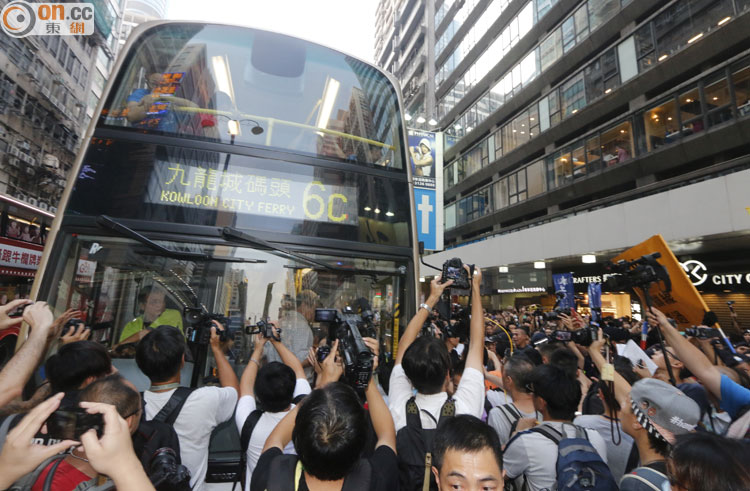
(Oriental
Daily) July 11, 2015.
After the Love Hong Kong people
left, the Localists turned their attention to the middle-aged Chinese female
singers on the pedestrian mall. During the shouting match, one middle-aged
Chinese female singer reported being shot by an air gun. The police used pepper
spray at least twice to maintain order.
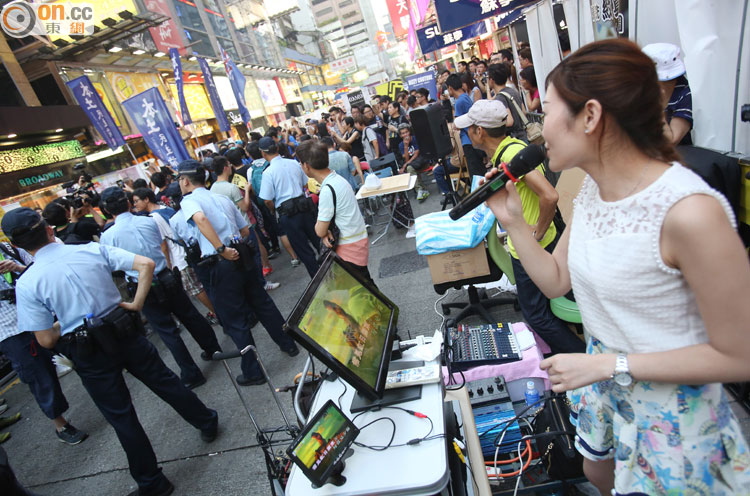
A middle-aged Chinese woman sing while protected
by a ring of police officers. The act of singing is protected under freedom of
speech everywhere in the world.
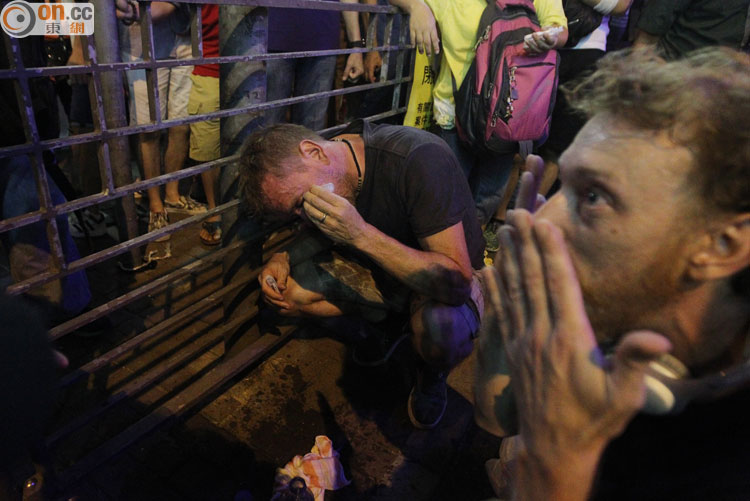
A couple of foreigners got some pepper spray from
the police.
(Oriental
Daily) July 11, 2015.
One demonstrator was arrested
today in Mong Kok. As is the standard practice, a number of masked Hong Kong
Indigenous demonstrators showed up outside the Mong Kok Police Station to wave
the British Dragon-Lion flag for Hong Kong Independence and to demand the
release of the arrestee. Some of the Localists charged onto the roadway to block
vehicular traffic. The police raised the yellow flag to warn them.
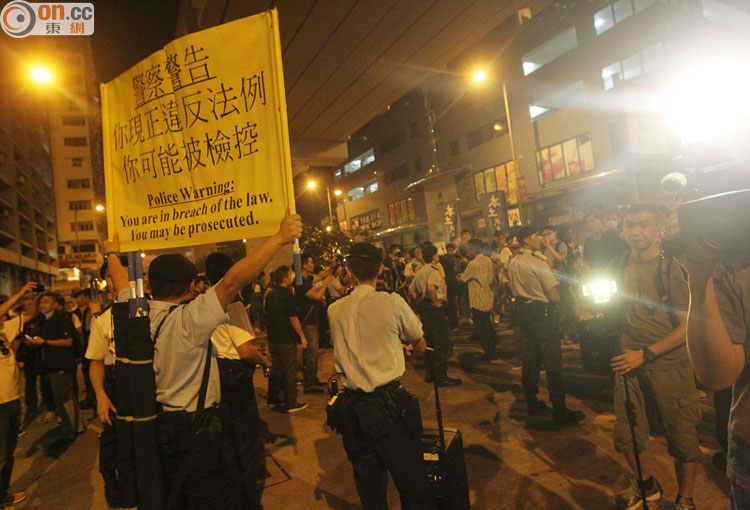
(SocREC at YouTube) July 11, 2015.
-
Episode 1
Yelling and more yelling.
-
Episode 2
Yelling and more yelling.
-
Episode 3
Discourse consists of yelling "Fuck your mother's stinking cunt!" etc. At 4:54,
Anna Chan rips up the British Dragon-Lion flag for Hong Kong independence. At
6:03, the Hong Kong Indigenous guy tells Anna Chan: "What can you do? You work
as a prostitute."
-
Episode 4
The British Dragon-Lion flag for Hong Kong independence is ripped up by a Love
Hong Kong supporter, and the Localists start chanting "Down with the Communists"
and "Fuck your mother." Anna Chan just smiles and waves the Chinese national
flag.
-
Episode 5
Localists yelling at Love Hong Kong convener Anna Chan waving the Chinese
national flag.
-
Episode 6
Police raised the yellow warning banner "Police Cordon - Do Not Cross"
-
Episode 7 Love
Hong Kong people leaving Sai Yeung Choi Street South, including the blocking of
Nathan Road by the so-called "photojournalists"
-
Episode 8
Speeches outside Mong Kok Police Station, with a man saying that he is not
Chinese and a woman screaming "Fuck your mother!" at the police.
(SocREC at
YouTube)
July 25, 2015 21:22. Localists harass the middle-aged Chinese female singers.
0:01. A middle-aged Chinese female
wearing black cap and black shirt sings on the pedestrian mall.
2:17. Police form a line to block
off the Localists (see the foul-mouthed beer-drinking blonde-dyed-hair woman
wrapped in the British Union Jack).
7:45. Gates were lowered at a
shopping center.
(Oriental
Daily) July 26, 2015.
About 170 persons attended the
Hong Kong Indigenous protest march from Causeway Bay to the High Court. The
purpose of the march is to protest against the verdict against the four Restore
Yuen Long defendants. A number of them wore masks, possibly because they didn't
want to be identified. Hong Kong Indigenous called for people to show up on July
29 at the sentencing of the Yuen Long Four. They do not exclude the possibility
of taking action at the court.
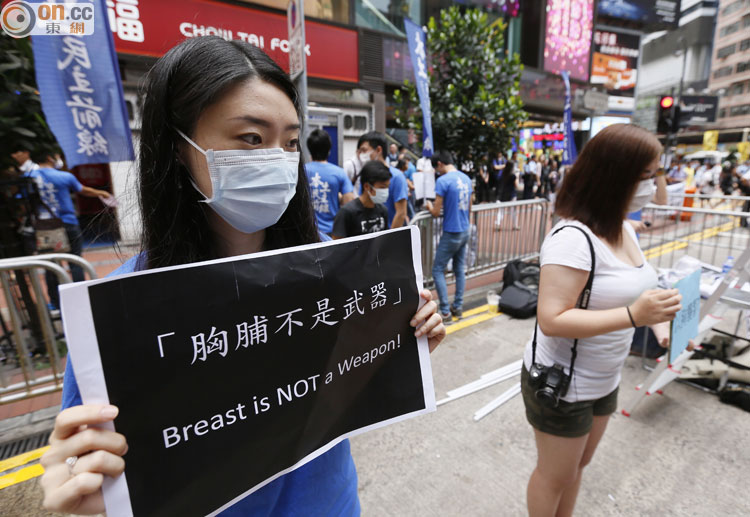
The "Breast is NOT a weapon!" sign
is a reference to the case of 30-year-old female defendant
Ng Lai-ying, who was found
guilty of assaulting a police officer after she thrust her breast at the police
officer and then screamed "Sexual molestation".
(Wen
Wei Po) July 27, 2015.
On July 17, magistrate Michael
Chan Pik-kiu found the four defendants guilty. Yesterday during the march, a
demonstrator held up the photo of magistrate Michael Chan Pik-kiu with the label
"human waste." According to a person in the legal field, this act insults the
magistrate and clearly constitutes a case of "contempt of court". If the
individuals were found guilty, the penalty would be severe.
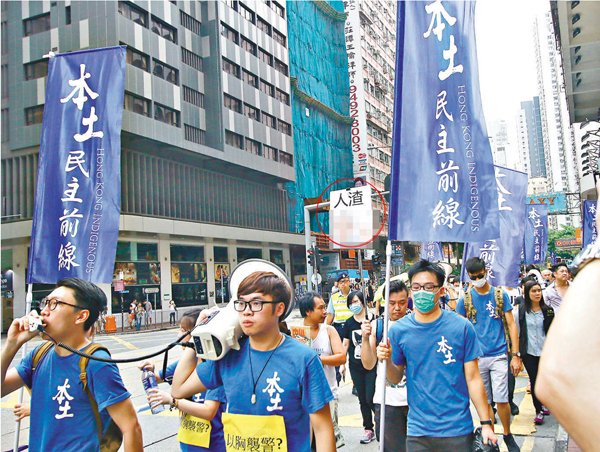
(Merriam-Webster)
Closure
: A situation or occurrence in
which something (such as a business or factory) closes forever
: A feeling that something has been completed or that a problem has been solved
: A feeling that a bad experience (such as a divorce or the death of a family
member) has ended and that you can start to live again in a calm and normal way.
(Wikipedia)
Next Media. Next Media Limited, founded by Jimmy Lai, has 4,041 employees (as of
30 Sep 2013) and is the largest-listed media company in Hong Kong ... Next Media
publications are also known for highly sensationalized articles which attract a
wide range of readers, including critics. Next Media has often taken a clear and
sometimes proactive support for democratic groups in Hong Kong.

(Oriental
Daily) July 16, 2015.
According to Next Media, its yearly profit
ending March 2015 fell 31.58% to HK$ 164 million. In terms of yearly
operating profit, the drop was 50.32%. During this period, books/magazines
and printing business income fell by 18% to record a loss of HK$25.73
million. Previously, the half-year loss ending September 2014 had only been
HK$ 4.56 million.
During 2014-2015, Apple Daily earned HK$
607 million, which is a 24.6% decline. The advertising revenues were HK$ 343
million, which is a 31.3% decline. Newspaper copy sales also declined, so
that distribution revenues dropped 13.6% to HK$ 264 million. Apple Daily
(Taiwan) saw a total decrease of 18.3% in revenues, with advertising
dropping 16.2% and distribution dropping 23.5%. Printing dropped 18.7%.
Yesterday, share prices for Next Media was
at HK$ 0.74, which is a 83% drop from the peak value.
(Oriental
Daily) July 17, 2015.
According to the Next Media Trade Union on
July 16, Next Weekly will be reducing its staff by 50%. Those who
have worked five years or less will receive a compensation of one month's
pay. Those who have worked five to ten years will receive two months' pay.
Those who have worked ten years or more will receive three months' pay.
Next Weekly will decide its future in mid-September. This is supposed to
be a voluntary retirement plan.
On July 17, it was announced that this was
a compulsory layoff in which more than 40 workers from Books A/B of Next
Weekly will be fired.
(Oriental
Daily) July 20, 2015.
On July 17, Next Weekly laid off 40
workers. Today, Sudden Weekly announced that it will cease
publication next month. Previously it was rumored that Sudden Weekly
would discontinue its print edition while preserving its online edition.
Today, Next Media has decided to close both editions and lay off 70 workers.
The last edition of Sudden Weekly
will appear on August 7th, which happens to be the 20th anniversary of its
first edition.
(Oriental
Daily) July 21, 2015.
Next Media Trade Union met with Next Media
management to discuss the future. Afterwards the Next Media Trade Union said
that there will be more adjustments for the new combination of Next
Weekly, Eat & Travel Weekly and ME!, as well as FACE.
(SCMP)
70 editorial staff laid off at Hong Kong's Sudden Weekly entertainment
magazine. July 21, 2015.
Seventy Sudden Weekly
editorial staff were laid off yesterday with Next Media set to close the
entertainment magazine next month and combine three other publications to
save costs. The move came less than a week after the group began cutting
jobs at its flagship publication Next Magazine with the aim of
slashing the workforce by half within two months.
Sudden Weekly
chief executive officer Chiu Wai-kin said last night the
final print and online issues of the 20-year-old magazine would appear on
August 7. Eat And Travel Weekly and fashion magazine ME!, both
Sudden Weekly supplements, will combine with Next Magazine
from August 16. Chiu said a shrinking advertising market had led to
deficits.
Next Media Trade Union said it was
"extremely distressed" by the decision, and colleagues were angry because
they had found out through news reports. Union chairman Alvin Wong Wai-chun
said it would meet the group's chief executive for the print media division,
Ip Yut-kin, today and seek compensation for sacked staff. It said more than
100 members in the Next group had been laid off since Friday.
(EJinsight)
Why readers will continue to buy Next Magazine. July 21, 2015.
Embattled print media group Next Media decided on Monday to stop publishing
its entertainment title Sudden Weekly next month. It is one of the moves the
media group has taken to address its falling advertising revenue and
tumbling circulation amid the fast-changing reading habits in the city.
However, its move has failed to answer the question: Why do readers need to
buy its magazines?
Next
Media’s management appears to be putting too much focus on transforming its
flagship newspaper Apple Daily from a print medium to an online news portal.
Among local newspapers, Apple Daily seems to have been successful in
undertaking such as transformation.
Action
News, its video news service, is the most popular among online video
platforms in Hong Kong. In fact, it has become a small-scale news channel on
the internet. But Next Media management doesn’t appear to have prepared well
on how to transform the group’s weekly titles. It seems the plan is simply
to shut down the print product and focus on the digital edition. But the
fact remains that readers won’t patronize the magazine’s online edition if
they don’t like the content — whether in print or digital form — in the
first place.
That’s
the core of the problem of Next Magazine: how to differentiate its content
from its online and print competitors so that it could stand out with a
unique market position.
Since
its debut in 1990, Next Magazine has established an image of a fearless and
outspoken advocate of truth and democracy to its readers. But this shining
reputation was somehow dimmed by other facets of its news gathering
operations, including its paparazzi teams who target celebrities as well as
its focus on triad, erotic and crime news.
This
has prevented Next from expanding its readership from the mass market to the
middle class, despite the fact that readers recognize Next for its watchdog
role.
In
2003, the Chinese government tagged Next Magazine and Apple Daily, along
with radio talk show hosts Albert Cheng Jing-han and Raymond Wong Yuk-man,
as the principal agitators who mobilized half a million Hongkongers in a
rally against the legislation of Article 23 of the Basic Law, which people
fear would restrict their freedoms. Beijing’s reaction indicated that Next
Magazine has a strong capability to play a key role in monitoring the
wrongdoings of both Hong Kong and Chinese authorities. But such an outspoken
stance cost Next Magazine dearly; it lost hundreds of millions of dollars in
advertising revenue from tycoons and their large corporations.
Hong
Kong’s media landscape has undergone massive changes since Leung Chun-Ying
became chief executive. Most print media have become virtual mouthpieces of
Beijing, but Next Magazine remains an exception.
Next
Media’s management should not blame the rise of free online news for the
decline of Next Magazine. It should seize the opportunity to take a
proactive response to the market by repositioning Next as the city’s only
outspoken newsweekly, rather than just selling the magazine with other
entertainment and leisure titles for a combo price of HK$20.
Some
industry observers commented that Next Magazine should condense its content
offering by focusing on investigative reporting, business stories and
quality columns and dropping its costly paparazzi stories to retain its
loyal readers.
Next
readers do not mind paying a premium for unique content. Next Media
management could even raise the cover price of Next Magazine to HK$30 or
HK$40 a copy in order to maximize its revenue from a group of loyal readers.
Next
Media said the Sudden Weekly bundle — Sudden Weekly, Me, a fashion title,
and Eat and Travel Weekly, a leisure title — will no longer exist after the
bundle releases its last issue on Aug. 13. The 70-member staff of Sudden
Weekly will be laid off. The remaining two titles of the bundle, Me and Eat
and Travel, will be part of the Next Magazine bundle from August. Face
Magazine, which targets young readers, will not be affected.
The
decision indicates that the company management will continue to support Next
Magazine while dismantling the Sudden Weekly titles. But whether the new
combo will attract enough readers to pay for the titles remains a big
question market. That could be a risk as current Sudden readers may not want
to pay HK$5 more to continue reading Me and Eat and Travel from the new Next
combo. Some market observers believe the new combo will help stabilize Next
Magazine’s circulation and prevent it from further decline. But whether the
title will report a growth in circulation is still too early to say.
No
doubt print media is entering an ice age, but media executives and editors
should not solely blame online competitors for their poor performance.
Readers will always consider the quality of content in choosing titles.
The
success stories of the New York Times and the Financial Times in the western
world have proven that the paid subscription model for traditional media is
still viable in the digital era. It’s time for Next Magazine to get rid of
its sensational journalism and return to its original mission of bringing
the truth to its readers.
(HKG
Pao) July 22, 2015.
So Next Media has to kill off one magazine.
Which is it? Next Weekly or Sudden Weekly?
This year, Next Weekly's circulation
has fallen down 15% to 60,122 copies. Sudden Weekly has also fallen
down to 77,588 copies, which is almost 30% more than Next Weekly.
Next Weekly's ad revenues has fallen
year after year, down to $149 million this year. Suddenly Weekly's ad
revenues has fallen down to $173 million this year, which is 16% more.
Next Weekly's total revenues is $196
million while Sudden Weekly's is $217, which $21 million more.
This year, Next Media says that its
magazine division lost more than $20 million this year. So which magazine is
losing the money? Next Weekly or Sudden Weekly?
So which magazine would you kill off?
Next Weekly carries politics, whereas Suddenly Weekly has
entertainment plus food/travel.
When the decision by the Next Media
management makes no money-sense, you have to look elsewhere for the
explanation -- the majority shareholder apparently wants to continue to play
politics, so what can the management team do?
(HKG
Pao) July 25, 2015.
This year, Next Media's newspaper business
revenue declined to HK$ 1,580 million while magazines fell down to HK$ 494
million. Over the last few years, these revenues have been declining at a
20% or higher per annum rate. At the same pace, Next Media will see
newspapers drop by HK$ 318 million to HK$ 1,262 million and magazines down
by HK$ 100 million to HK$ 394 million next year. Overall, Next Media will
see a total decline of about (1580 + 494 - 1262 - 394) = HK$ 418 million in
revenues. Given that the profits were HK$ 168 million this year, Next Media
will see profits become a loss of (168 - 418) = HK$ 250 million if it does
nothing.
Right now, Next Media has just fired 100
workers. At an average monthly salary of HK$ 30,000, this is a savings of
less than HK$ 40 million. That won't be enough.
Where to cut costs? So far, they have
already cut down on raw materials from HK$ 50 million to HK$ 30 million. At
Next Media, salaries account for 51% of the total costs. Next Media has
2,200 workers in Hong Kong costing HK$ 1,400 million per annum. Where else
can they look to cut costs except to fire more workers?
So which departments will be devastated in
the upcoming layoffs?
There are 966 workers at the newspaper and
printing departments and they earned HK$ 1,500 million. There are 825
workers at the magazines and they earned HK$ 495 million. Meanwhile over in
Taiwan, their magazine division only has 275 workers. So it is obvious that
they will axe more magazine workers.
The magazine division is likely to earn HK$
100 million less next year. So far, they axed 100 persons to save less than
HK$ 40 million. How many more people would have to be laid off?
Are the Next Media Internet operations
doing well? So far, they have increased revenues by 70% to HK% 600 million
this year. However, profits were only $30 million. Therefore, the Internet
division is just running a 5% profit like many traditional media operations.
Internet comments:
- The demise of Next Media can be laid
directly to Occupy Central. Because Next Media went all out to support
Occupy Central, businesses stopped placing advertisements with Next Media.
When the magazines lost advertisements, they become thinner because they
have fewer ad pages and fewer sponsorships and also because they have less
money to spend on developing content. When they become thinner, readers lose
interest. This is a vicious cycle.
- As the sayings goes, "If you believe 10%
of what Apple Daily says, you will go blind in both eyes." Even for a
regular reader, by the time that the tenth Apple Daily story that you
forwarded to your friends is revealed as bogus, you will lose the motive to
forward any more.
- Amongst Apple Daily's all-time BIG LIE is
the case of Chan Kin-hong:
(SCMP)
November 11, 1998.
The Apple Daily newspaper yesterday
gave over its entire front page to an apology for its reports on
controversial widower Chan Kin-hong.
Owner Jimmy Lai Chee-ying, who signed
the apology, said the incident had been handled improperly, although he
insisted the paper had not, as alleged, paid $5,000 directly to Mr Chan.
He described the reports as 'sensational' and pledged a review of the
newspaper's practices. 'The inappropriate way of handling the stories
made the readers and the public dissatisfied and led to strong
criticism. I and the editorial management of the paper are uneasy and
sorry about it,' he wrote.
Mr Chan, 41, drew media interest after
his wife threw their two sons out of a window before leaping to her own
death from their Sheung Shui home on October 19. She was reported to be
upset about her husband's visits to mainland prostitutes. Soon
afterwards, Apple Daily printed pictures of Mr Chan in bed with
prostitutes in Dongguan. It said it had paid $5,000 to Mr Chan's
associates.
- Yet another Apple Daily
blast-from-the-past:
(SCMP)
January 14, 2013.
Hong Kong’s Apple Daily
newspaper on Monday apologised for an erroneous front-page report, in
which it wrongly quoted scandal-plagued Executive Councillor Franklin
Lam Fan-keung saying he discriminated against new immigrants.
In its apology, the
Chinese-language newspaper admitted that its reporters had made the
mistake by failing to catch the word “not” in Lam’s sentence, part of a
speech he gave at private seminar last Thursday.
The Apple Daily report,
published on Sunday, quoted Lam as saying in Cantonese at the seminar:
“I do discriminate against new immigrants”.
Lam denied having made the
discriminatory remarks and expressed regret at the report. At a press
conference held on Sunday afternoon on a housing survey conducted by a
youth group, he replayed a tape recording covering the segment of his
speech to show what he had actually said. The recording showed a voice
of Lam saying: “I do not discriminate against new immigrants at all.
After they arrive in Hong Kong, legally they have become Hong Kong
people, Hong Kong first-class citizens.”
Soon after Lam’s denial,
Apple Daily withdrew the report in question from its website.
Apple Daily chief editor Cheung
Kim-hung said in its Monday apology that he had listened to the tape
recording and admitted the paper had made a mistake. Cheung said the
word “not” was uttered too softly to hear, and the mistake was due to
its reporter’s listening problems and negligence. “Even so, it is a
mistake, and we have to apologise,” he said.
- There is a court case against
Next Weekly that will be decided shortly:
(SCMP)
March 3, 2015.
A Next Magazine article
had a "cancerous effect" on the prospects of mainland herbal shampoo
maker BaWang International as its accusation that its products caused
cancer led to a share price slump, the High Court heard yesterday.
Barrister Jason Pow SC, for
BaWang, opened the case for his client's HK$500 million-plus defamation
claim against the Hong Kong magazine's publisher over an article on July
14, 2010, which claimed that BaWang's shampoos contained carcinogenic
substance 1,4-Dioxane.
The court heard BaWang's revenues
reached 930.8 million yuan (HK$1.17 billion) in the first six months of
2010, a year-on-year rise of 36.7 per cent. Its profits also went up by
47.1 per cent.
"[The financial statement] shows
how beautiful the prospect of the plaintiff's business is shortly before
the publication of this article," Pow said.
Pow also drew judge Mr Justice David Lok's
attention to a Bank of America Merrill Lynch analyst report that painted
a rosy picture of BaWang's growth before the article was published.
However, the share price of BaWang, which used movie star Jackie Chan to
promote its products, slumped by 20 per cent following the publication
of the article, Pow said.
The barrister also accused
Next Magazine, represented by Benjamin Yu SC, of failing to include
BaWang's response to the allegation that three shampoos tested by the
magazine contained 10 parts per million (ppm) 1,4-Dioxane.
The company's reply had included
suggestions by the Occupational Safety and Health Administration in the
United States that it was acceptable for consumer goods to contain up to
100 ppm 1,4-Dioxane.
On the evening of July 13, 2010,
a team of Next Magazine journalists stormed BaWang's premised in
Guangzhou, the court heard. The manufacturer's staff arranged a phone
interview for a journalist with chief executive Wan Yuhua.
Pow said staff also lined up an interview
for the journalists with the Guangdong Chamber of Daily Used Chemicals.
He added that the article painted "hardly a full picture" of efforts
BaWang made to address Next Magazine's allegation.
- Relevant link:
Kiddie
Porn in Hong Kong, or How FACE came to replace EasyFinder.
- (Oriental
Daily) June 22, 2015. Next Media has 128 convictions for violating
the Control
of Obscene and Indecent Articles Ordinance. As such, they are the
industry leader by a wide margin.
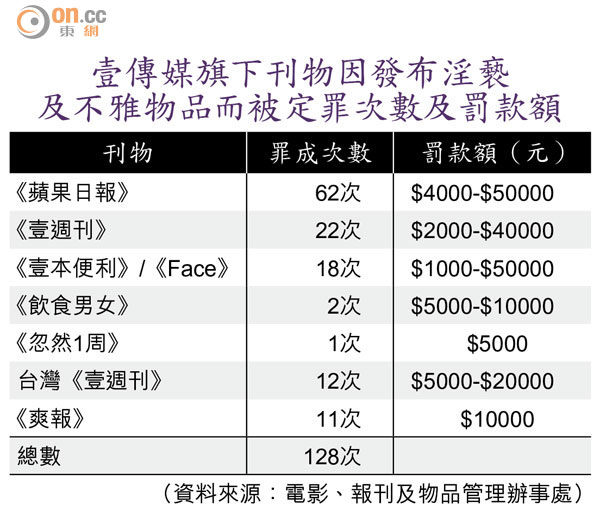
- According to yet another Next Media
special from Lee Wai-ling, CY Leung won't make it past January 2016 as Chief
Executive. But the real question is: Will Next Media make it past January
2016?
- When Xi Jinping shook hands with John Tsang, Apple Daily reported that
Tsang will replace CY Leung as Chief Executive effectively immediately. Next
they reported that CY Leung has been designated to serve a second term as
Chief Executive. Now they are reporting that CY Leung is going to leave
before January 2016. Who is going to bother to keep track of their latest?
- According to Hong Kong University Public
Opinion Programme, 1.2 million persons participated in Occupy Central. All
Next Media is asking now is for each of them to spend $7 per day to buy a
copy of Apple Daily. But these people have gone the way of the
HKTV viewers --
they are all talk but no action. They will say that they support the cause,
but they won't put their money where their mouths are.
- Apple Daily used to be the principal
money-earner for Next Media. Nowadays, you pick up a copy of Apple Daily and
you will be struck by its lean size. Many articles use extra large fonts in
their headings to take up more space. Most of the articles are customized to
fit the pre-determined political positions, which makes them repulsive to
read.
- Lee Cheuk-yan and his Confederation of
Trade Unions usually pounce on any labor problems, but you should expect
them to go missing in action because Jimmy Lai is his biggest donor. There
is no way that Lee Cheuk-yan is going to rustle up his posse and picket
Jimmy Lai's Kadoorie Hill home.
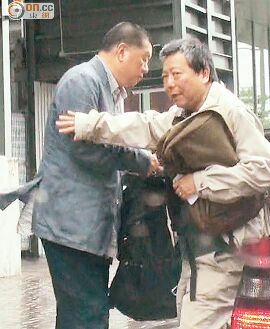
Jimmy Lai and Lee Cheuk-yan are good buddies
- The Journalists Association will also go
missing in action because they are a front for Next Media.
- Next Media is using its contributions to
the workers' Mandatory Provident Fund (MPF) accounts to offset severance
payments, thus enabling them to dismiss long-serving employees at little
cost. But you should not expect Lee Cheuk-yan to object, because that was
exactly what he did when he fired his own aide.
- Next Media needs to fire 50% of its
workers because they want freedom, democracy, human rights, universal
suffrage and rule-of-law.
- Jimmy Lai would rather donate tens of
millions to the pan-democratic political parties than save the jobs of his
fiction writers.
- Pity the fired Next Media workers,
because no other media outlet would consider hiring them as they come
from an ethics-deficient organization.
- Sudden Weekly was still profitable
but Next Media is going to shut it down. Why? They could have just sold it
and make some money. If Next Media has a re-organization plan, they should
have announced it. Instead, they are hitting the headlines every few days
with more layoffs at this or that division. This is bleeding to death by a
thousand cuts.
(HKG
Pao) July 31, 2015.
Hong Kong Journalists Association
chairwoman Sham Yee-lan said that the switching from print to digital media
with its dismissal of numerous employees represents "a courageous man
cutting off his arm to save his life." She said that it is the trend for
traditional media to lose market share and digital media to gain market
share. Therefore, she is optimistic about the future.
Next Media Trade Union spokesperson Lee Ka-chung
said that none of the 110 dismissed strong dissatisfaction about being
dismissed. He emphasized that the union has no intention of triggering any
strike action. He hopes that Next Media can look after the interests of the
workers.
-
Stockholm syndrome: Stockholm syndrome, or capture-bonding, is a
psychological phenomenon in which hostages express empathy and sympathy and
have positive feelings toward their captors, sometimes to the point of
defending and identifying with the captors. These feelings are generally
considered irrational in light of the danger or risk endured by the victims,
who essentially mistake a lack of abuse from their captors for an act of
kindness. The FBI's Hostage Barricade Database System shows that roughly 8
percent of victims show evidence of Stockholm syndrome. Stockholm syndrome
can be seen as a form of traumatic bonding, which does not necessarily
require a hostage scenario, but which describes "strong emotional ties that
develop between two persons where one person intermittently harasses, beats,
threatens, abuses, or intimidates the other."
- (Oriental
Daily)
One consequence of the troubles at Next
Media is that political contributions from Jimmy Lai is drying up.
Previously, the Civic Party has received more than HK$ 6 million from Lai,
which makes him their largest contributor by far. This year, Civic Party has
taken in hundreds of thousands less so far. On July 1st, Civic Party took in
the highest amount of donations to the tune of $430,000. That does not mean
that they are swimming in cash, because that amount includes sales receipts
from merchandise (towels and t-shirts), and they don't actually make that
much after deducting the cost of the merchandise.
In addition, the Civic Party has problems
recruiting new members. In recent years, the Civic Party has lost the aura
of professional elites. Instead, they have espoused radical causes/actions
(such as Occupy Central, Localism, etc). Professionals are attracted to the
newly emerged professional organizations for legal scholars, doctors, etc,
while radicals find the Civic Party not radical enough for their tastes. As
a result, the Civic Party are not getting enough both money and people.
Q. Do you think that universal
suffrage of the Chief Executive can affect national security?
12.1%: Agree very much
12.9%: Agree somewhat
24.3%: Neither agree nor disagree
18.0%: Disagree somewhat
28.7%: Disagree very much
4.1%: No opinion/refused to answer
Q. Do you agree that Hong Kong
must adhere to the principles of peace and non-violence in fighting for
political development?
57.6%: Agree very much
21.8%: Agree somewhat
14.8%: Neither agree nor disagree
2.6%: Disagree somewhat
1.8%: Disagree very much
1.4%: No opinion/refused to answer
Q. Do you want to see CY Leung get
another term as Chief Executive?
5.5%: Very much want
6.3%: Somewhat want
26.2%: So-so
13.8%: Somewhat don't want
42.8%: Very much don't what
5.3%: No opinion/refused to answer
Q1. For the coming three years,
should the government focus on economic development and livelihood issues rather
than on political reform?
59.6%: Agree
15.2%: Disagree
23.2%: Half-half
2.1%: Don't know/hard to say
Q2. What is the likelihood of the
Standing Committee of the National People's Congress retracting or changing its
decision made on August 31 2014 concerning the political reform in Hong Kong.
3.7%: Definitely possible
10.2%: High possibility
50.1%: Little or slight possibility
23.8%: Completely impossible
12.3%: Don't know/hard to say
Q3. What is the political future
of Hong Kong in the coming three yeasr?
12.4%: Optimistic
46.4%: Pessimistic
38.5%: Half-half/so-so
2.8%: Don't know/hard to say
Q4A. Should the current Hong Kong
SAR government restart the political reform process?
42.8%: Yes
45.5%: No
11.5%: Hard to say/don't know
Q4B. Should the next Hong Kong SAR
government restart the political reform process? (Base: Those who answered "No"
or "Hard to say/don't know" to Q4A)
41.3%: Yes
30.7%: No
27.9%: Hard to say/don't know
Q5. Who bears the most
responsibility for the failure of the political reform?
20.9%: Hong Kong SAR government
30.9%: The pan-democratic camp
24.2%: The central government
10.0%: The pro-establishment camp
4.1%: Others
9.9%: Don't know/hard to say
(Sina.com.hk)
July 3, 2015.
Almost every Hongkongers has been
to Mong Kok, a fashion centre of Hong Kong. Due to high rents and shifts in
consumption patterns, fewer Mong Kok malls now cater to small boutiques. In the
last two years, King Wah Centre and Gala Place have both brought in large-sized
chain stores to steady their rental incomes.
As you walk down Sai Yeung Choi
Street South, there are three fashion malls: Gala Place, King Wah Centre and
Mong Kok Centre where many people can buy at good prices. Two years ago, King
Wah Centre got rid of the boutiques and rented out to the Sincere Department
Store. Last month, Gala Place got rid of the small boutiques and rented out its
lower three floors to transnational fashion store H&M. According to
information, the rental income soared 100% to HK$ 9 million per month. Since the
average H&M items sells for $300, they will have to sell 1,000 items per day in
order to pay the rent without counting wages and other operational expenses.
Mong Kok Centre is still holding
firm. But more renters are leaving than renting. Last month, about 20 renters
declined to renew and closed. So there was the rare sight of empty stalls in the
mall. Even though the owners are reducing rents, there were no takers. Things
are worse now than during the SARS period.
In recently years, the rents at
these malls have gone to over $100 per square feet per month, even as much as
$300 per square feet per month. The typical rent is at least $25,000 per month.
The boutiques sell items typically at less than $100, so they find it hard to
afford the high rents.
For the owners, their renters can
only take so much rental increases. Furthermore, it is hard to manage a large
number of boutiques. This is what motivates the malls to change the business
model and increase rental income. When King Wah Centre rented out to Sincere,
the rent was $6.5 million per month, which is almost 200% more than renting to a
large number of boutiques.
The demise of the fashion malls
was also affected by the change in consumption patters. Those boutiques that
offer cheap prices are facing competition from online shops. More Fast Fashion
retailers are showing up, and they offer better quality and prices than the
boutiques together with post-sales servicing. This is why Gala Place is bringing
in H&M to replace the boutiques.
Internet comments:
- Nobody wants to go to Mong Kok
anymore. They only have dispensaries, electronics stores, jewelry stores, etc.
What people really want are the small take-out restaurants that sell egg
waffles, curry fish balls and beef entrails. You can't find them in Mong Kok
anymore.
- Dear keyboard warrior, when was
the last time that went to Mong Kok? Just go to Dundas Street (between Fa Yuen
Street and Sai Yeung Choi Street South), Sin Tat Plaza (Argyle Street), Mong Kok
Road (by the Goldfish Market), Newport Cinema (Fa Yuen Street and Soy Street),
Bute Street (between Sai Yeung Choi Street South and Goldfish Market). You have
to be blind not to see the egg waffles, curry fish balls, beef entrails, fried
chicken, grilled satay skewers ...
- It is one thing to have the Bird
Market, the Flower Market and the Goldfish Market in Mong Kok, being those
unique places in Hong Kong with a high concentration of specialty stores. But
there is nothing special about curry fish balls etc because you can get them
anywhere (Tsuen Wan, Causeway Bay, Siu San Wan, Sheung Wan, wherever). There is
no point in turning Mong Kok into a place with 500 fish ball/beef entrails
stalls.
- The demise of Mong Kok Centre
came about for two major reasons. The first reason is
Occupy Mong Kok. When regular
customers found it inconvenient to come, it becomes a habit not to come. The
second reason is Chinese Communist oppression in the form of
Taobao, because you
can find everything you need quicker, cheaper and more convenience over there.
- Who would want to go there to
shop when a bunch of Yellow Ribbon Zombies yell "I want genuine universal
suffrage" every night? Why would a business want to rent a space there?
- Temple Street is
quintessentially local. Do you see hundreds of thousands of Hongkongers flocking
there every night? Please do not kid yourself that Hongkongers really want only
localism! For reference, see HKTV
-- people can talk the talk, but they have to actually walk the walk.
- Yes, the Localists said that
Hong Kong needs to build up an agricultural industry in order to become
self-sufficient and therefore Hongkongers should move out to North East New
Territories to grow organic vegetables. That's all talk and no action.
- If there is a huge demand for
the products sold in the several hundred boutiques in Mong Kok Centre, that mall
would be hundreds of thousands of customers spending hundreds of millions of
dollars every day. But there are too few customers to even allow the boutiques
to cover rent. If you want to place the blame, it goes to people who won't shop
there. And it is their right to shop or not shop.
- The reason why business is
falling in Mong Kok is that there are large shopping malls everywhere else.
There is less need to go to Mong Kok.
- If there is no need to to go Mong Kok, then why does Hong Kong Indigenous/Hong
Kong Localism/Civic Passion want to drive the mainland tourists away from Mong
Kok. What do they care if the place has only dispensaries and jewelry stores if
they don't go there?
- Mong Kok is not even the Central
Business District. The Central Business District of Hong Kong is in
Admiralty/Central. The commercial rents are the highest in Hong Kong because of
the demand from multinational companies. Following the logic of the Localists,
they should be out there chasing the foreigner companies away to make way for
low-rent curry fish ball stalls and light manufacturing factories (like those
who make plastic Christmas trees).
- Nostalgic about the bygone days
on Nathan Road? When I was young, there were rattan furniture stores, coffin
stores, joss paper goods stores, paper kite stores, etc. Are these businesses
viable today? Besides it's all talk and no action anyway, because no young
person would ever work in these places.
(Oriental
Daily) July 1, 2015.
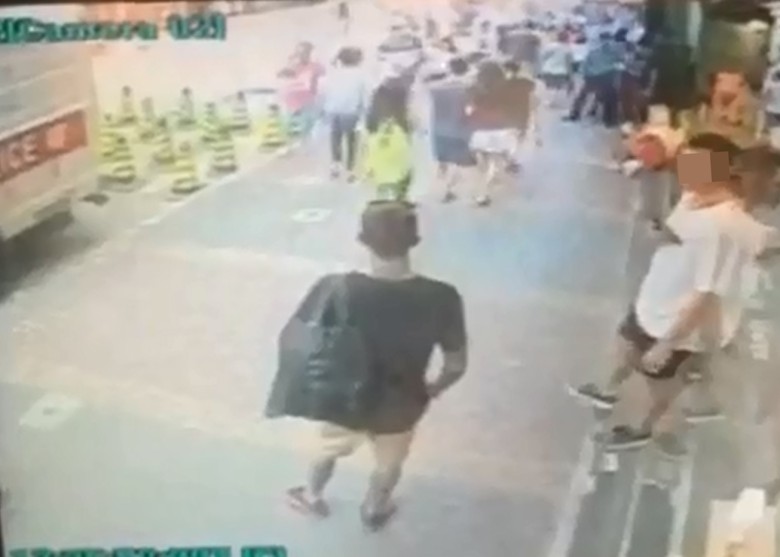
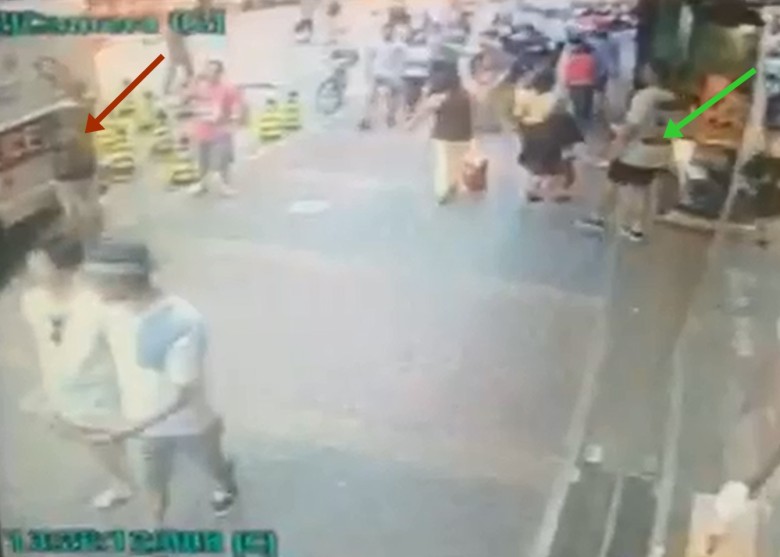
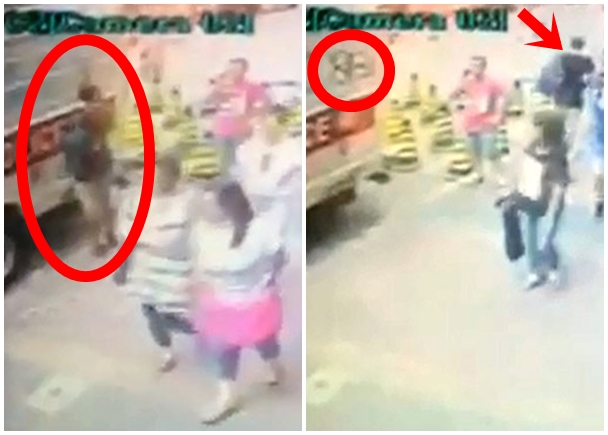
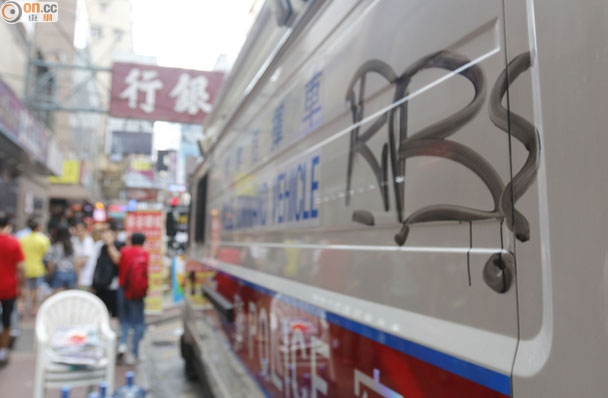
On Sai Yeung Choi Street
South, someone wrote the letters RBS (or RB?) on the side of a Hong Kong
Police van. The police obtained the surveillance
video from a store and replayed the entire action. In this 26-second
video, two foreigners in white and black clothes respectively stood in front
of an electronics store and looked around. When they saw that no one was
paying attention, the foreigner in black went up to write the letters while
the foreigner in white filmed the action with his mobile phone. The two men
then left in a hurry. At 8pm that evening, the police arrested two
Australians, a 23-year-old named Colk and a 22-year-old named Adamson.
According to the information,
this police van was parked outside the Bank Centre at the intersection of
Nelson Street and Sai Yeung Choi Street South. It was going to serve as the
command centre for the Songkran (water splashing) festival that the
Localists announced. This was no ordinary Songkran because people on the
Internet were suggesting using abrasives to attack people, and the police
took these threats seriously.
Internet comments:
- I don't know what "RB"
stands for. I do know that in Chinese, "SB" stands for "stupid cunts."
- A less common usage of "RB" in Chinese is to "fuck a cunt." Were those
Aussies horny?
- What is "RBS" or "RB?"?
The Australians have last names Colk and Adamson which do not contain the
letters R or B. Google search says that the most commonly cited RBS for
Australia is the Royal
Bank of Scotland. Of all the things that I want to scratch on a police van,
the "Royal Bank of Scotland" is not one of those.
- Could RB be short for "rubbish"?
- This shows that Hong Kong is
a surveillance society where people can't even have the privacy when they
write graffiti on police vans. I think I'll immigrate to Australia as soon
as possible, because they have freedom and democracy.
- Sai Yeung Choi Street South is probably the densest surveillance spot in
the universe due to the
acid attacks.
(EJinsight)
June 29, 2015.
Democratic Party founding chairman Martin Lee Chu-ming has called on Hong
Kong people to join the July 1 protest to demand a relaunch of the political
reform process after lawmakers vetoed the Beijing-backed proposal for the
2017 chief executive election, Apple Daily reported on Monday. Lee said a
huge turnout will exert pressure on the government to restart the process.
Echoing Lee’s call, Civic Party leader Alan Leong Kah-kit said the public
should participate in the march to show Beijing that Hong Kong people will
not give up their fight for genuine universal suffrage.
According to the Civil Human Rights Front, around 100,000 people are
expected to turn up for the march.
Lee
said fighting for genuine universal suffrage has been the theme of each
year’s July 1 march. With that objective yet to be achieved, people should
come out on Wednesday to pursue the fight, he said. Lee noted that there are
still two years before 2017, giving the government enough time to table
another political reform proposal that would either ignore election
framework issued by the National People’s Congress Standing Committee on
Aug. 31, 2014, or at least offer a higher degree of democracy.
Democratic Party chairwoman Emily Lau Wai-hing said the July 1 march, aside
from seeking to restart the electoral reform process, will also raise other
issues, including high property prices and the overloading of the public
health system.
Executive Council convenor Lam Woon-kwong said on Sunday he does not see any
chance for the the electoral reform process to be restarted within the
foreseeable future.
(Oriental
Daily) June 30, 2015.
This year the Civil Human Rights
Front have set the theme as "Build a democratic Hong Kong, take back the future
of our city." The sub-themes include amending the Basic Law and other items.
They applied to the police for a 100,000-strong march. However, the consensus is
that the turnout will much lower than in recent years and no group has declared
Occupy Central II, the police will be marshaling only 3,000 police officers
(which is 1/3 of the force amassed for the Legislative Council vote on the
constitutional reform proposal."
Since the Civil Human Rights Front
is known to deliberately slow down the march, this time the police will clear the way
for the lead car so that there can be no excuse. Furthermore, because hot
weather is expected, the police will arrange for the marchers to start even
before 3pm if the soccer fields are 85% filled already.
(Oriental
Daily) June 30, 2015.
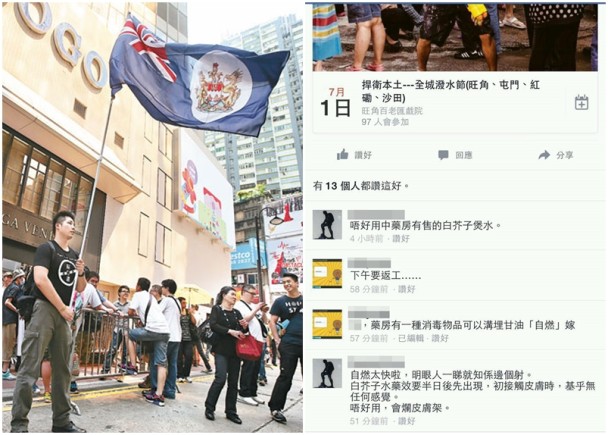
Certain Localists have declared
that they will hold "water splashing festivals" in Mong Kok, Tuen Mun, Hung Hom
and Sha Tin in order to defend Localism. As of noon today, almost 100 people
said that they will participate. One netizen suggested: "The dispensaries sell
disinfectants which will combust spontaneously when mixed with glyceride oil."
Another netizen corrected him: "Spontaneous combustion is too fast. Mustard
seeds are better because you don't feel anything at first but 12 hours later
your skin will burn."
The police said that they are
concerned, because the designated areas are crowded with people. The police
remind people to obey the law and look after their own personal safety.
(Oriental
Daily) July 1, 2015.
The Civil Human Rights Front
planned to start the march at 3pm, but they did not start until 330pm. It is not
known whether this has to do with the sparse attendance. The marchers occupied
less than one soccer field.
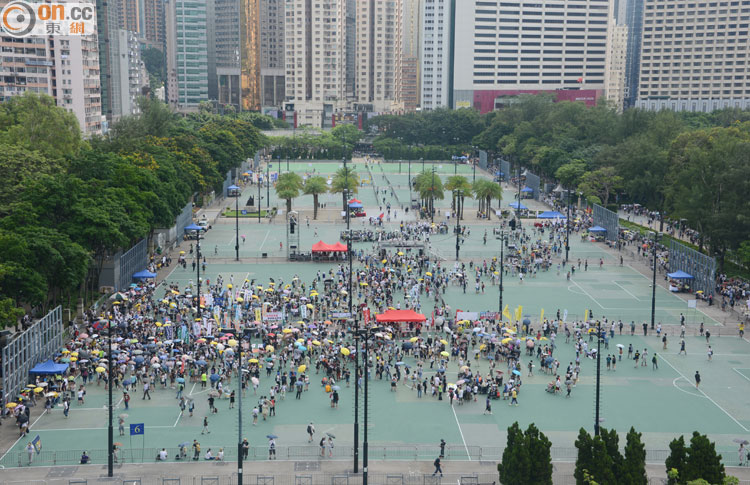
(SCMP)
Marchers thin at Victoria Park as July 1 pro-democracy protest kicks off. July
1, 2015.
The annual July 1 march kicked off at
Victoria Park at 3pm, with demonstrators set to march on the Hong Kong
government headquarters – though some pro-democracy activists have predicted
a lower turnout.
The Civil Human Rights Front, the organiser
of the pro-democracy march, held a rally at Victoria Park in Causeway Bay at
2pm but crowds only filled about one and a half soccer pitches.
With 10 minutes to go till kick-off, the
soccer fields near the Causeway Bay entrance to the park were either empty
or only filled with a few people including the march organisers, dozens of Falun
Gong practitioners and journalists. More people were filing in
through the Tin Hau entrance of the park. The crowd began filtering out of
the park at about 3.25pm. By 4.30pm, police had reopened Causeway Road, the
first part of the march route, to traffic.
(Oriental
Daily) July 1, 2015.
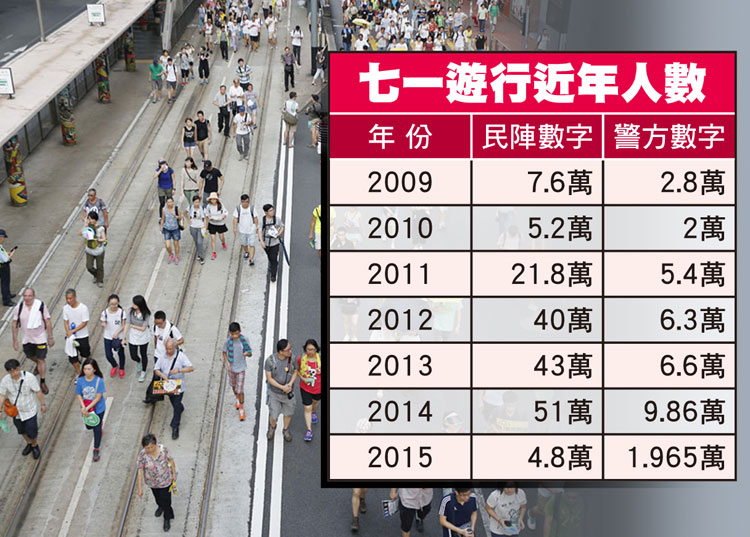
July 1st size estimates
2009: Civil Human Rights Front 76,000;
Hong Kong Police 28,000
2010: Civil Human Rights Front 52,000; Hong Kong Police 20,000
2011: Civil Human Rights Front 218,000; Hong Kong Police 54,000
2012: Civil Human Rights Front 400,000; Hong Kong Police 63,000
2013: Civil Human Rights Front 430,000; Hong Kong Police 66,000
2014: Civil Human Rights Front 510,000; Hong Kong Police 98,600
2015: Civil Human Rights Front 48,000; Hong Kong Police 19,650
For 2015, the Hong Kong Police estimated
about 6,240 persons started out from Victoria Park. At 3pm, two soccer
fields were half-occupied. Therefore the organizers delayed the start and
appealed to those who want to join in the middle to come down to Victoria
Park to make the starting crowd more presentable.
(Commercial
Radio) July 1, 2015.
Hong Kong University Department of
Statistics and Actuarial Science professor Paul Yip conducted research along
the route and estimated that between 18,000 and 22,000 marched.
(Hong
Kong University Public Opinion Programme) July 1st, 2015.
The Hong Kong University Public Opinion
Programme estimated that 28,000 persons marched.
(SCMP)
Protest fatigue and lack of clear goal blamed for slump in July 1 rally
turnout. July 1, 2015.
The turnout for the July 1 rally for
democracy yesterday plunged to the lowest since 2008, with observers and
marchers blaming protest fatigue and the lack of an obvious goal after the
rejection of the government's electoral reform package.
The Civil Human Rights Front, the organiser
of the annual pro-democracy march, last night put the turnout at 48,000,
compared with last year's 510,000. Police said the number of marchers peaked
at a mere 19,650, compared with 98,600 last year. The University of Hong
Kong's public opinion programme put the turnout at around 28,000, compared
with 162,000 last year. Professor Paul Yip Siu-fai, an HKU statistician,
estimated around 20,000 people took part in the march.
Front convenor Daisy Chan Sin-ying admitted
the turnout was lower than expected. "After the vote on the reform package,
there is no burning issue so people may not feel any urgency to protest,"
she said. But she disagreed it meant people had given up on the fight for
democracy or considered the march useless. She also dismissed suggestions
that the low turnout indicated a lack of public support for their call for
an amendment to the Basic Law.
Ivan Choy Chi-keung, a political scientist
at Chinese University, attributed it to post-Occupy fatigue and the lack of
urgent political issues. "A growing number of protesters also believe the
city should no longer stick to peaceful protests in achieving democracy in
the wake of the Occupy sit-ins," Choy said.
(Post 852) July 1st, 2015.
The Civil Human Rights Front announced the
crowd size for the 2015 July 1st march was 48,000, which is a lot less than
the 510,000 for 2014. When you see that apart from the Falun Gong, only
soccer fields 4, 5 and 6 have people standing there, you knew this was
happening.
The two main themes of the Civil Human
Rights Front this year were: "Build democracy in Hong Kong" and "Take back
the future of our city." The five slogans were "CY Leung resign," "hold the
black police responsible," "rescind the public security rules and
regulations", "eliminate the nomination committee" and "amend the Basic
Law."
I was not standing at the head of the
procession, so I don't know what was happening there. But in the middle and
back of the procession, I heard a few isolated "CY Leung resign" but I never
heard the other slogans. So the Civil Human Rights Front had a problem this
year with publicizing things.
Actually not only the participants but the
political parties and groups did not care much about the slogans of the
march. Frankly, they were more interested in exhibiting their own products
and propaganda.
Last year, the Occupy Movement was the main
theme of the July 1st march. Even if the political parties have different
positions, they can only react to the Occupy Movement in their own style. So
there was a clear theme. But this year the slogans don't have a leading
theme. Furthermore, "Amend the Basic Law" and "Build a democratic Hong Kong"
are not positions that all political parties and groups concur with.
With respect to the street booths, there
were many more local organizations. This is in response to the call for
micro-level cultivation in the post-Occupy era. But it is noteworthy that
while the Occupy Central with Love and Peace booth caught a lot of
attention, it is less so this year. Also, the Federation of Students are
less prominent now that half the universities have withdrawn.
Even the pro-establishment booths that were
meant to counter the march were non-descriptive.
After the Umbrella Movement and the veto of
the constitutional reform bill, it is natural that the number of marchers
should fall due to the lack of issues. The carnivalization of the march is
not a big problem. When an issue arises, there will be a carnival again. The
political parties and social groups need support, and they cannot be
criticized for soliciting donations on July 1st.
But the Civil Human Rights Front was even
more disappointing than the fall in numbers or the Carnivalization. Given
what was happening in the afternoon, there shouldn't be any statements about
"hopefully the number of participants will match the same level as last
year." They were also open about "amending the Basic Law." Also it was
unnecessary to "feel astonishment" that someone would hold a Hong Kong
independence flag and promote Hong Kong independence at a time when Localism
is so widespread.
(SCMP)
Critics have harsh words for Hong Kong's democracy march and rally. July 2,
2015.
While thousands flocked to Victoria Park
yesterday to participate in the annual pro-democracy rally and march, there
was no shortage of harsh words from their opponents. Some dismissed it as
"pointless". Others said they were fed up with the seemingly endless
protests of the past year and wanted harmony.
The Civil Human Rights Front, which
organised the event, was banking on public discontent with the government
after last year's Occupy protests to turn it into another massive
anti-government display. The Occupy protesters took over roads in Mong Kok,
Admiralty and Causeway Bay to press Beijing to give Hong Kong what they
considered "genuine universal suffrage".
Nothing was achieved, though, and the
campaign, characterised by violent conflicts between supporters, opponents
and police, ended after 79 days.
Yesterday morning in Taikoo Shing, Loren
Lau, a 50-year-old administrative officer, said she was not interested in
joining the marchers because "they are too extreme". She dismissed the young
activists as "spoiled children" who only offered criticism but no solutions.
"Democracy doesn't mean you want your way only," she said.
In Central, waiter Edwin Chung Long-win,
20, said his father forced him to join the July 1 rallies in the past, but
he did not support the activists' demands and feared the march could
degenerate into violence. "Their idea of freedom isn't mine. The 'umbrella
movement' was only propaganda. [The protesters] damaged public property and
fought with police officers," Chung said.
Accountant Susan Chan, 33, of Causeway Bay,
had also marched in the past but said she was fed up with the
"pan-democrats' anti-everything attitude" and decided not to take part this
year. "I don't quite follow the pan-democrats' logic. When the government
allows all people one man, one vote, they say no and reject the political
reform. Now they come out and say they will fight for democracy for us,"
Chan said. "Hong Kong people would have been able to elect our chief
executive but for the pan-democrats."
The political reform proposed by the
government was voted down 28-8 in the Legislative Council last month after
31 pro-establishment lawmakers walked out in a failed attempt to delay the
vote. Without the support of the 27 pan-democrats, the reform package could
not get the two-thirds majority in the legislature required for it to pass
anyway.
Secondary school teacher William Li, 54,
said he did not think protests were effective in pressuring the government.
"I have joined several marches after the Occupy movement and the turnout was
so low. People seem to have turned to more radical action, like storming the
Legislative Council." Li was once a regular at the July 1 marches but
decided to stay at home this year.
High school pupil Dominic Wan, 18, chose to
spend the day shopping. "We don't have anything to complain about. I'm not
too fond of this Occupy thing. I don't believe it's good for Hong Kong.
[They] annoy a lot of people. I think Hong Kong is good as it is. I think we
depend on China."
Restaurant manager Michael Lee, 45, said:
"What I want is a more peaceful Hong Kong. Since the Occupy movement, I have
been feeling a sense of insecurity. The city is not as safe as it was
before."
(SCMP)
‘We don’t want Hong Kong independence’: July 1 march organisers refuse to side
with localists. July 2, 2015.
The organisers of yesterday’s annual Hong
Kong pro-democracy rally have distanced themselves from localists advocating
independence from China for the city.
Daisy Chan Sin-ying, convener of the Civil
Human Rights Front which organised the march, said the group did not think
that Hong Kong should seek independence. “The front actually does not hold
such a view [on Hong Kong independence],” she said during an RTHK talk show
today.
She said the group, in demanding to amend the
Basic Law to solve the city’s constitutional and livelihood issues, was a move
that followed the “one country, two systems” framework. “The Basic Law gives
Hong Kong a high degree of autonomy except for military and diplomatic matters
... The problem is only that the central government is not implementing what
is stated in the Basic Law,” she said. “It is not that there is an urgent need
for Hong Kong to seek independence.”
Chan made the remarks after a handful of
localists joined yesterday’s rally, standing in front of the organisers’ “big
banner” and leading the marchers at one point. The localists brandished the
colonial-era Hong Kong flag, a symbol now seen as advocating independence.
She said the front was shocked by the
localists’ action and its stalwarts argued with them in asking that they
refrain from trying to lead the march.
Videos:
(The Epoch Times)
https://www.youtube.com/watch?v=19e0-5TmGRc Victoria Park
crowd
(The Epoch Times)
https://www.youtube.com/watch?v=uLeVyJxnYK4 The head of the
procession
(The Epoch Times)
https://www.youtube.com/watch?v=h7QnQt0J7EQ Falun Gong banner
demanding the prosecution of Jiang Zemin
(Bastille Post)
https://www.youtube.com/watch?v=pud-TZ9m9qg
(dbc)
https://www.youtube.com/watch?v=4Ygh0qGqo1w Quarreling between
opposite camps
(INT News Channel)
https://www.youtube.com/watch?v=Hg7T9HlLHXA Police surrounded the
Scholarism station.
(INT News Channel)
https://www.youtube.com/watch?v=UuRgSs8mcO0 News report
(Passion TImes)
https://www.youtube.com/watch?v=V1lLMMH-2_k Civic Passion screaming
at pro-establishment people
Internet comments:
- Low attendance this year? I am
going to bring out the beer and peanuts, and watch how the Yellow Ribbons tell
me
where the silver lining in the cloud is. Some candidates:
--- They are saving their energy to beat up the police
canines in Mong Kok tonight
--- They are holding acid/water splashing festivals elsewhere
--- July 1st (Wednesday) is only a public holiday and most people have to work
--- It's okay as long as they keep sending the donation checks in. You don't
have to actually attend a wedding banquet, but your wedding present (preferably
as $CASH$) must arrive.
--- They are waiting for
Lau
Wong-fat to show up before they start.
--- They only gave away 300 free-shirts. But
this only proves the people did not come
out here for freebies today.
--- The Chinese Communists
re-opened Lai Yuen Amusement Park in Central/Admiralty and drew away the missing people.
--- The
world is small small small small
--- Audrey Eu said that fewer people came out because people are no longer
worried about the constitutional reform proposal being passed in the Legislative
Council.
--- (Oriental
Daily) Occupy Central founder Benny Tai said that the number of marchers
this year exceeded his expectations. Therefore, you can put aside any idea of
low attendance this year. Thank you.
- When there are numerous marchers, Benny Tai said that it is great. When there
are very few marchers, Benny Tai says that it is great. Things are always great
for Benny. You have a nice day too, thank you.
--- When the June 4th attendance
was lower than expected, they said that people were saving themselves for the
big show on July 1st. When the July 1st attendance was lower than expected, they
said that people were still fatigued from Occupy Central/constitutional reform.
What will be the excuse for the next big event, namely the District Council
elections in November?
--- Wait, they are predicting a
1.2 million turnout for the anniversary of September 28 when the Hong Kong
Police used tear gas against demonstrators. That would be before the November
elections.
--- Democratic Party chairwoman
Emily Lau says that there have been too many large assemblies such as the June
4th march and the June 4th candlelight vigil, and so citizens are fatigued. She
expressed concern that citizens may come down from heat stroke. Aha, so we now
find out that either the July 1st march occurred for the first time in 2015,
and/or
all previous ones were held in cool weather.
- Former Federation of Students
secretary-general Alex Chow said that the low number does not mean that the
democratic forces have vanished. It only proves that "when the need arises,
there will be resistance." He explained that the citizens do not have any sense
of urgency to march because the government's constitutional reform proposal has
been vetoed.
- Is Chow trying to say that the citizens really wanted urgently not to have
one-person-one-vote and now they are very content with the outcome?
- Former Federation of Students
deputy secretary-general Lester Shum said that he had expected a big drop in the
number of marchers. He said that democratic movements necessarily go through
peaks and troughs. Therefore, it is meaningless to say that the movement is dead
when the numbers are low and that there can't always be 500,000 every year.
- The mainland official media
criticized the slogan of "Amend the Basic Law" as being radical but also as
pointless as the demand to move the exchange rate to one Hong Kong dollar for
100 American dollars.
...
- It is also possible that the
organizers may refuse to release a number, saying that the only important thing
is the marchers today represent the will of the people of Hong Kong. They can
persuade the Hong Kong University Public Opinion Programme from releasing their
data in return for a sizeable donation. But they can't stop the Hong Kong Police
from issuing a crowd estimate, which becomes the one and only official estimate.
- A soccer field can easily
accommodate 100,000 persons:
Camp Nou,
Rose Bowl,
Michgan
Stadium
- Can they beat the 85,000 at the Sha Tin Racecourse on the third day of the
Lunar New Year? (Apple
Daily)
- Can they beat the number for the new
Lai Yuen Amusement Park? That's 10,000 in the first three hours.
- Can they beat the number for those who lined up to get tickets for
July 1st Open Day at the People's Liberation Army barracks in Shek Kong?
That's 18,000. Another 12,000 went to the PLA base at
Stonecutters Island.
- Can they beat the number for the Ikea's
Midnight Madness Sale at Megabox in Kowloon Bay? (see photo)
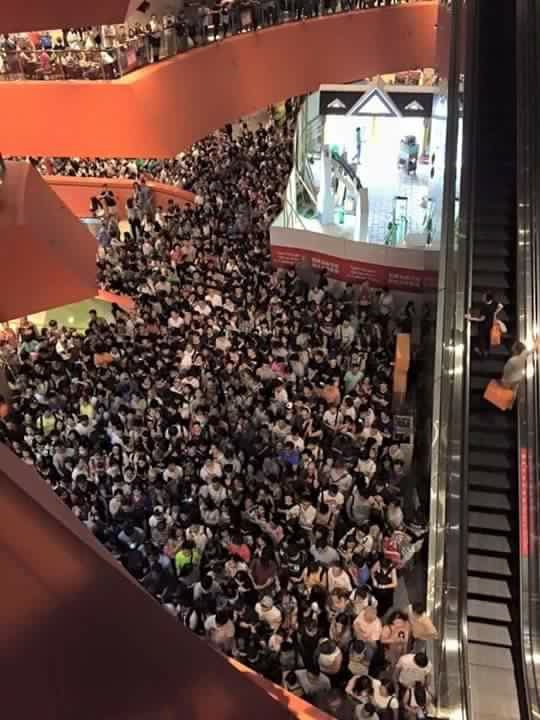
- The police said that they have
3,000 officers on duty. Were there more police officers than marchers?
- Stupid! The 3,000 police officers are on the ground and therefore they are
counted among the marchers. Whatever the number that the organizers conjure up
eventually, you
make sure to subtract 3,000 from it.
- And Falun Gong pays 1,000 people to march. So you make sure to subtract
another 1,000.
- And there must be 1,000 so-called photojournalists. So you make sure to
subtract another 1,000.
- And there are 3,000 Filipina maids demanding a pay raise to $4,500 per month.
So you make sure to subtract another 3,000. (Note: If they are demanding a pay
raise for themselves, then they cannot be fighting for democracy. A public
referendum among Hong Kong voters would only lower their wages!)
- Well, when they filled six
soccer fields on June 4th,
they claimed 500,000 persons. Now they have only 1-1/2 fields, so that is still
500,000 x 1.5 / 6 = 125,000. This is more than the 100,000 that they predicted
at first. Things have never been better.
- When they started out, the
police counted 6,420 persons. Somehow another 48,000 - 6,420 = 41,580 joined in
later. Well, what is the point of assembling and setting out when practically
everybody joins up later along the route?
- The police said that 6,420
started out from Victoria Park. These are the traditional pan-democrats who
assembled there by habit. This is a much lower number than in previous year and
suggests that this base has eroded severely. The first reason is Occupy Central,
which ended after 79 days with absolutely nothing gained. The second reason is
the constitutional reform, where the veto now means that there is no chance for
universal suffrage in at least ten years. Given these reasons, what would anyone
want the pan-democrats to continue to lead the way?
The police said that the peak
number was 19,650. The additional people joined after the start, entering at
places such as the Goose Neck Bridge. These are the pro-democracy people who
will not listen to the Civil Human Rights Front anymore. They have all sorts of
other issues and demands, from environmental protection to gay marriage to burn
victims to autistic individuals. They tend to be more single-issue-oriented and
they don't have affinity for the Civil Human Rights Front's main issues
(amending the Basic Law?). How can these people form a cohesive opposition
force? That's a good question that the capos in the backroom (Jimmy Lai,
Joseph Zen, Anson Chan, Martin Lee) will have to figure out.
- How hard is it to cover six
soccer fields anyway? Everybody just bring the biggest beach umbrella that you
can find.
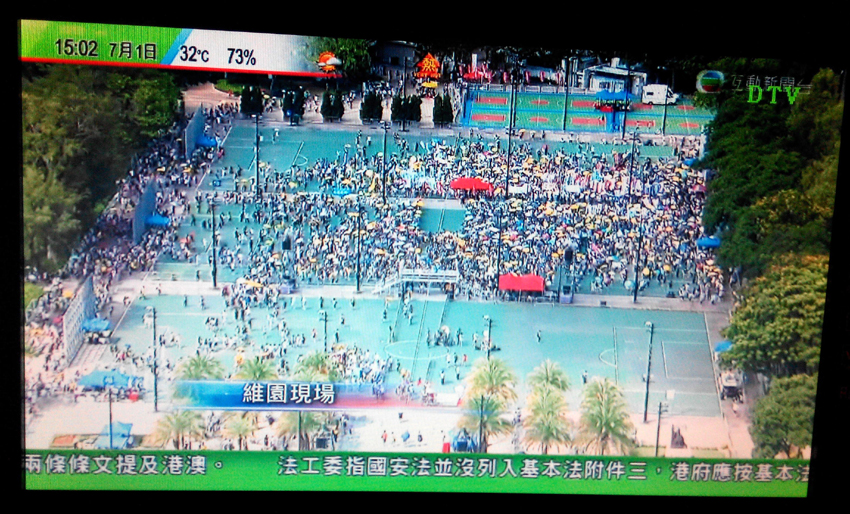
- What will the Apple Daily
headline be for tomorrow? Even they can't say "500,000 marched for democracy."
More likely, it will be "Marchers faint from heat stroke, CY Leung doesn't care
whether citizens live or die."
- Blast from the past from Li Yi
in
Apple Daily, January 2, 2010: Although only 30,000 persons marched in
the street, there were probably several million more who quietly carry hope and
conscience in their hearts. So there you have the virtual headline: Millions
marched for democracy!
- Yes, I agree that there were millions in the streets today (note: I didn't say
that millions marched in the streets today).
- (Oriental
Daily) Best story of the day: Former Hong Kong Chief Secretary Anson
Chan came with Hong Kong 2020 research director Lee Wing-tat and others to
march. As usual, she said "Bye bye" to Lee Wing-tat at the intersection of
Hennessey Road and Queens Road East and left. She tried to hail a taxi with no
success. So she walked into a nearby coffee shop and drank a fruit juice. She
stayed for 15 minutes and left by taxi afterwards.
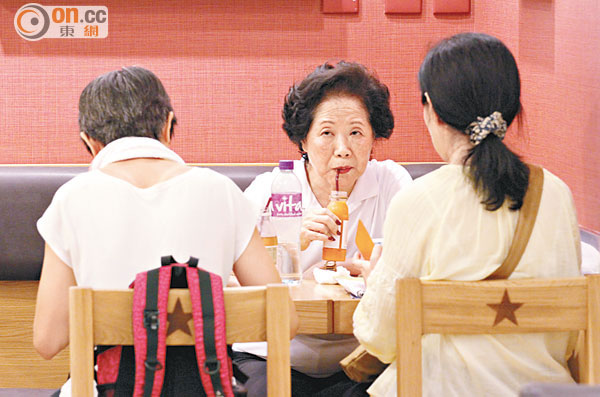
- Some bitch was on television
declaring that public opinion as evidenced by the demonstration today clearly
favors an immediate re-start of the five-step process for constitutional reform
and amending the Basic Law. You have to be a politician in order to lie like a
dog.
- (RTHK)
Civil Human Rights Front convener Daisy Chan said afterwards that their
organization is only responsible for organizing the event in which citizens
participate out of their own personal beliefs. As such, she is not accountable
for the turnout at the event.
- Ah, yes, but aren't these guys very much into this "accountability" thing?
Anything happens, and they say "XXX must apologize and resign." When they are in
the line of fire, all of a sudden they claim zero responsibility.
- (RTHK)
Daisy Chan said earlier that the number of marchers this year should be able to
match the same level as last year (for which the Civil Human Rights Front claimed
510,000). Why is anyone listening to her?
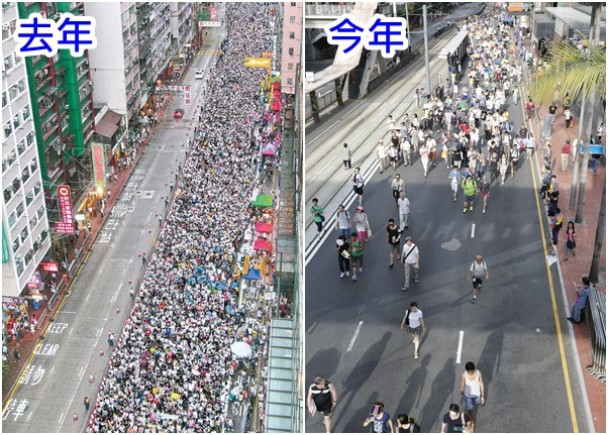
Left pane: 2014
Right pane: 2015
- Daisy Chan is absolutely the worst person ever to lead the Civil Human Rights
Front. Her problem is that she can't remember what she said before and those
gaping self-contradictions are shocking. For example, she once explained away a
low event attendance because people have to work. And that was on a Sunday. This
time, she says that July 1st is a public holiday when people have to work. What is a
public holiday then? By the
General
Holidays Ordinance, this means a day which shall be kept as a holiday by
all banks, educational establishments, public offices and government
departments. Yes, some people have to work (police, firemen, transportation,
etc), but they do that year-round because they provide essential services.
- (Oriental
Daily,
Oriental Daily,
Oriental Daily)
The numbers game really doesn't
matter. The real game is the donations. The organizers Civil Human Rights Front
went down from $438,000 last year down to $248,000 this year. The League of Social Democrats took a
major hit this year, going down from $930,000 last year to $350,000, probably because chairman Leung Kwok-hung said that he
turned down a $100 million offer to switch his vote and therefore his party
coffers must be flushed with cash already. People Power went from $420,000 to
$210,000. Scholarism went from $1,310,000 last year to $540,000 this year but
the impact is unknown since they won't disclose their finances. The Democratic Party took a hit too,
going from $200,000 down $160,000.
The Labour Party went from $180,000 to $110,000. The Neo-democrats went from
$134,000 to $100,000. Civic Party actually gained a little bit, from $415,000
to $435,000.
But the real winners of the day are
the flesh-peddlers (you don't even know what they stand for, but so what?).
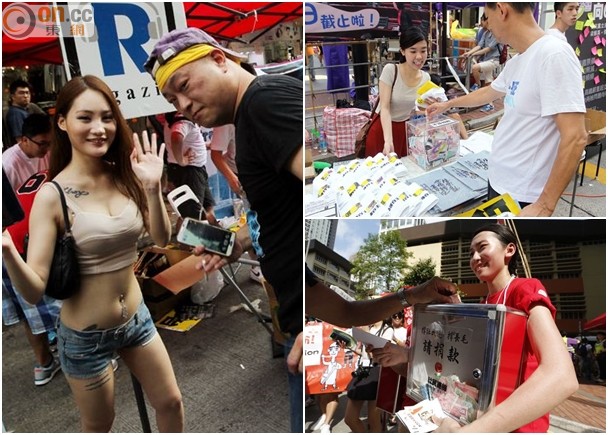
- Self-contrarian: Civil Passion's
Wong Yeung-tat once said: "Fuck every donation-soliciting organization!" On this
day, he was out there begging for alms too.
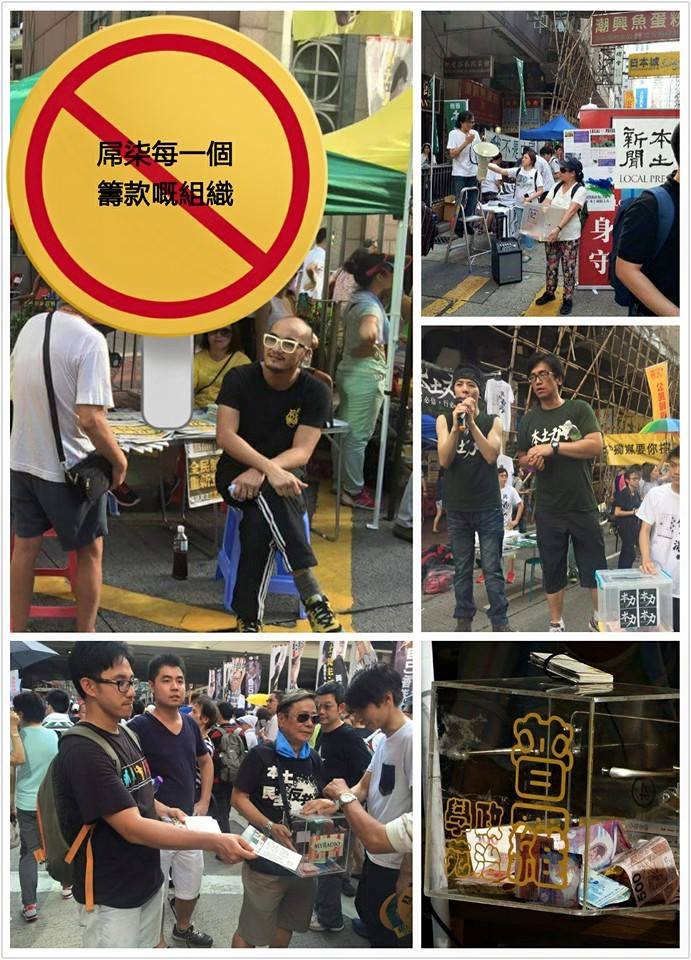
- (Metro
Radio)
With respect to the people
carrying the British Dragon/Lion flag for Hong Kong independence jumping into
the head of the procession, Civil Human Rights Front convener Daisy Chan said
that it was not their idea. She emphasized that the Civil Human Rights Front does not
agree with the idea of Hong Kong independence.
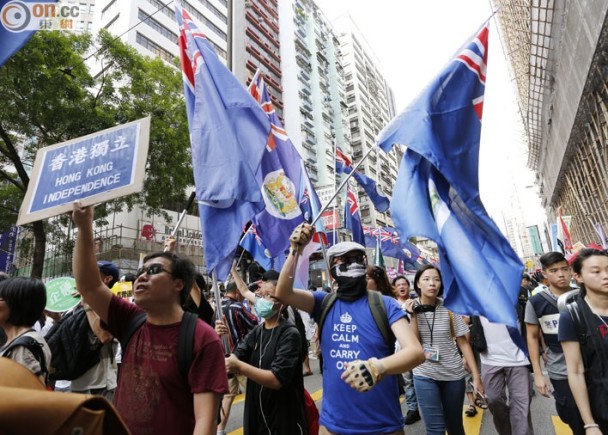
- (VJmedia)
I joined the Localists' kidnapping of the head of the procession this time. The
results were very good. The Civil Human Rights Front wanted to chase us away but
they failed. In the end, they called the remnants of the Federation of Students
to raise their flags alongside of us the whole way. It was a very funny scene
LOL.
- The slogan "CY Leung must
resign" has been around forever in various forms. For as long as I remember,
they have seen saying "XXX must resign" every single year, where XXX is the
Chief Executive at the time. If you repeat this often enough, it will lose its
edge.
- (SCMP)
Scholarism convener Joshua Wong Chi-fung
also believed the lack of a clear theme was the "key reason" for the low
numbers. "All the student bodies, civil societies and political parties were
unable to come up with a clear framework for the next democratic movement," he
said. "We have to admit our own limitations and find out shortcomings in the
existing strategies and theories." One of the event's themes was to amend the
Basic Law, but Wong said discussions in the past few months were only a start
and no consensus had been reached as to how to achieve that goal.
Short-term implication: To those
who marched today, you've wasted your time.
Long-term implication: We have no
idea of what we are doing.
Thanks for making it very
clear.
(Occupy
Central with Love and Peace)
2. Rules for Non-Violent Protest
1. Insist on the use of non-violence
means. In the face of law enforcers and anti-Occupy Central demonstrators,
never hurt anyone physically or mentally, or damage any properties.
2. Be brave in facing the
authorities and accept the responsibilities of civil disobedience. Do not
use any masks to cover faces.
3. Do not bring any weapons or
anything that can be used as weapons.
4. When facing arrest, form a human
chain and lie down to show our non-cooperation. Do not struggle hard so as
to avoid injury.
5. Be bold in the face of violence.
Do not try to hit back. Move to a safe place and ask for the help from the
picket or medical team.
- See more at: http://oclp.hk/?route=occupy/eng_detail&eng_id=28#sthash.ggO8I1xq.dpuf
2. Rules for Non-Violent Protest
1. Insist on the use of non-violence
means. In the face of law enforcers and anti-Occupy Central demonstrators,
never hurt anyone physically or mentally, or damage any properties.
2. Be brave in facing the
authorities and accept the responsibilities of civil disobedience. Do not
use any masks to cover faces.
3. Do not bring any weapons or
anything that can be used as weapons.
4. When facing arrest, form a human
chain and lie down to show our non-cooperation. Do not struggle hard so as
to avoid injury.
5. Be bold in the face of violence.
Do not try to hit back. Move to a safe place and ask for the help from the
picket or medical team.
- See more at: http://oclp.hk/?route=occupy/eng_detail&eng_id=28#sthash.ggO8I1xq.dpuf
Rules for Non-Violent Protest
1. Insist on the use of
non-violent means. In the face of law enforcers and anti-Occupy Central
demonstrators, never hurt anyone physically or mentally, or damage any
properties.
2. Be brave in facing the
authorities and accept the responsibilities of civil disobedience. Do not use
any masks to cover faces.
3. Do not bring any weapons or
anything that can be used as weapons.
4. When facing arrest, form a
human chain and lie down to show our non-cooperation. Do not struggle hard so as
to avoid injury ...
(The
Standard) Occupy Central is action based on risky thinking. By Lai
Tung Kwok. June 12, 2014.
With the launch of the
constitutional reform consultation, the Occupy Central movement arouses wide
public concern.
According to the Ci Hai Chinese dictionary,
the meaning of "occupy" is to forcibly take possession of geographic space; to
forcibly take control of a territory or a position.
"Occupy" has important implications that
involve the controversy over "legal" or "illegal" and whether it will affect
areas including people's living, social order, normal operation of the
financial, industrial and commercial sectors including the hotel and tourism
businesses, the stability of our economy and local and foreign investment.
As secretary for security, I have the
responsibility to explain clearly the nature of the Occupy Central movement
and its impacts.
In an article entitled "The Most Lethal
Weapon of Civil Disobedience" in the Hong Kong Economic Journal on January 16,
2013, University of Hong Kong associate law professor Benny Tai advocated the
use of non-violent and civil disobedience action to fight for true democracy.
Up to 10,000 protesters will be unlawfully
mustered to block roads in a bid to paralyze the political and commercial
heart, aiming to force the central government to accede to their demand.
The proposal has gained the support of
Chinese University of Hong Kong associate professor Chan Kin-man and Hong Kong
Alliance in Support of Patriotic Democratic Movements of China standing
committee member Chu Yiu-ming.
It appears many people still do not
understand clearly whether Occupy Central is an unlawful act and whether
organizers can control it and follow their self-proclaimed principles of
"non-violence" and "bearing legal liability." They have not fully considered
the consequence of paralyzing Central and whether the assembly will go out of
control endanger public order and safety.
Tai noted that Occupy Central is a weapon
with mass "disruption power." On that, the action should comply with
principles including: The number of participants is critical, perhaps forcing
police to use a higher level of force and incur a higher political cost for
the government. Ten thousand people or more can achieve such a purpose. To
express their stance with civil disobedience. To break the law, but with no
violence. Resources will be deployed to block main roads in Central. A
broadcast center will be set up to draw the attention of the public and the
world through the media to mount greater political pressure. Civil
disobedience is an unlawful act. Participants will be asked to pledge to bear
legal liability and to surrender themselves to police after the blockade and
let the authorities decide whether prosecution will be taken against them.
These form an integral part of the political inspiration for the movement.
Two months after this outline, the three
organizers unveiled the Occupy Central manifesto, in which I noticed a
modification to the disobedience principle listed above. It stated that people
can participate in the movement in different modes: pledging support only and
not needing to perform unlawful acts; not needing to surrender to the police
after the blockade or to file a defense at a trial; or surrendering to police
but not filing a defense.
In an article entitled "What Offenses Could
Be Committed By Occupy Central?" in Chinese on May 24, 2013, Tai further
pointed out that participants might commit offenses: Under the Summary
Offenses Ordinance, a person who obstructs, inconveniences or endangers a
person or vehicle in a public place can be fined HK$5,000 or imprisoned for
three months. Under the Public Order Ordinance, Occupy Central should be
considered an unauthorized assembly. So every person who "without lawful
authority or reasonable excuse knowingly takes ... part in such an
unauthorized assembly" is guilty of an offense and liable for imprisonment for
up to five years and a fine. Under the Public Order Ordinance, when three or
more people assemble and "conduct themselves in a disorderly manner ... to
cause any person reasonably to fear that the persons so assembled will commit
a breach of the peace or will by such conduct provoke other persons to commit
a breach of the peace, they are an unlawful assembly."
The article also mentioned that a first
conviction would likely mean a fine or a few weeks' imprisonment or a
suspended sentence.
In any event, the organizer has admitted that
occupying Central by civil disobedience would be a law-breaking act, so the
legality of Occupy Central is definitely in question.
More broadly, despite its lack of natural
resources Hong Kong has become a world city largely due to long-term efforts
by generations across different sectors of the community. The success gained
over the years is treasured by everyone.
A law-abiding community is the cornerstone of
our stability and prosperity. Everyone is equal before the law and all
citizens should abide by it. There is no justification for anyone for whatever
reasons, including civil disobedience, to be above it.
Recently, there was extensive media coverage
about the Court of First Instance of the High Court reducing sentences imposed
on legislators Raymond Wong Yuk-man and Albert Chan Wai-yip, who were
convicted of unlawful assembly, to a fine.
The judge quoted the trial magistrate's "The
Reason for Sentence," pointing to the fact that unless a court ruled that a
law violated the Basic Law or human rights there has never been a single law
in Hong Kong that people can chose to abide to or to ignore.
"Even those with strong views on certain
social issues should still be held liable for contravening criminal offenses.
No one is above the law, or else the rule of law as a core value of the
society would be undermined ...
"Freedom of speech and freedom of
demonstration and protest are the core values of Hong Kong, but the rule of
law is equally important. Any unlawful or non-peaceful assembly could entail a
tendency or a risk to jeopardize the rule of law in an open and extensive
manner. The rule of law must not be jeopardized, because instability is
detrimental to the development of society."
Do the organizers of Occupy Central have the
ability to maintain the movement's non-violent nature? In view of opinions
expressed recently by various sectors, including radical groups in media
reports, I believe the answer is eminently clear.
After the Taiwan students' occupation of the
Legislative Yuan and the Executive Yuan, various groups declared they would
occupy or besiege landmarks in Hong Kong, including the Central Government
Offices and the Legislative Council.
In an article entitled "Occupy Legislative
Council and Occupy Central" published on March 25 in Apple Daily, Tsai said:
"In fact, there is no monopoly in taking protest actions. Occupy Central is
not and should not be the only form of protest action by Hong Kong people ...
"Protests will be diverse. Apart from the
Occupy movement there will be various forms of protests [and in] locations
including the Legislative Council... People will organize their own form of
protests in support of each other to generate the greatest political effect."
On April 15. Apple Daily published another
article by Tai, "In Response To Queries Of Older Generation On Occupy
Central." He pointed out that Occupy Central is a rally and organizers could
not guarantee it would be absolutely peaceful.
I now quote a Ming Pao editorial "The
Radicals Alter The Nature Of Occupy Central" from May 24 on aims for the 2017
chief executive election:
"Although the organizers of Occupy Central do
not agree that the movement has been hijacked ... the development of the
movement is running counter to their subjective good intentions. Now the
radicals have taken over Occupy Central, with only proposals containing the
element of civil nomination [for chief executive] screened in and all moderate
proposals deliberately eliminated. The moderates have been marginalized ...
"Records show that demonstrations held by the
radicals have usually ended up in a disorderly manner. It is hard to believe
that the radicals would scrupulously abide by the peaceful and non-violent
principle when Occupy Central takes place."
As the objectives, visions, strategies and
means of expression of protesters in public processions differ, radicals will
take the opportunity to hijack the movement and turn peaceful meetings into
violent ones, deviating from the original plan.
During the Legislative Council Finance
Committee meeting on June 6 on funding for advance work on northeast New
Territories new town areas, radicals forced their way into the Legislative
Council. The incident shows clearly how a peaceful demonstration can go out of
control.
In view of the nature of Occupy Central and
possible consequences, I would like to remind people that when considering
whether to join the movement as participants or onlookers they must consider
personal safety and legal liability.
Finally, we will ensure actions in accordance
with the law while taking robust action to uphold the rule of law and maintain
safety and order.
Lai Tung-kwok
Secretary for Security

Here are some of the cases that
have come before the court. Compare these against the Occupy Central with Love
and Peace rules on non-violent protest.
(Oriental
Daily) May 1, 2015.
19-year-old maintenance worker Au
Yik-kit was charged with spraying a 3-meter-by-3-meter red-colored circle on
Hennessey Road in Causeway Bay. The police asked him to remove the paint but he
refused. Therefore the police arrested him and charged him with criminal destruction of
property. Au is implicated in the Sheung Shui warehouse case in which he is
charged with attempted arson, loitering and possessing restricted weapons.
(Oriental
Daily) June 16, 2015.
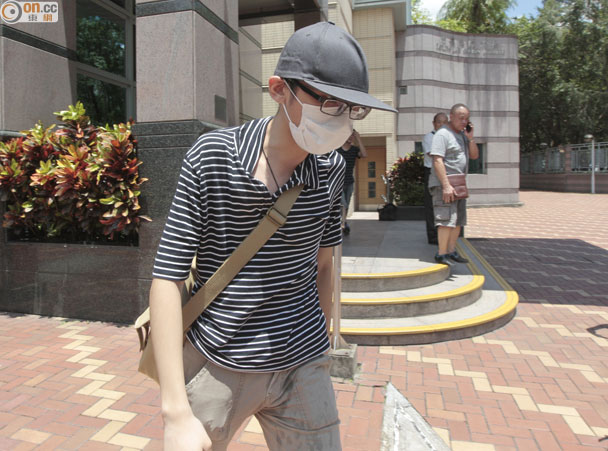
Three young men heeded an Internet
call for action. 19-year-old unemployed man Au Yik-kit said that he was the
lookout. He was charged with possession of an assault weapon and loitering. He
denied these charges.
According to a New Territories
North District Police Tactical Unit officer, he was working the night shift and
encountered the defendant at San Fung Road, Shek Wu Hui. The police officer
found the defendant has two switchblades in his pockets. The defendant claimed
that he owed $8,500 in debt and was afraid of being beaten up. Therefore he
carried the knives for self-defense. The police officer then found matches,
igniter, maps and other items in another pocket. The police arrested the
defendant. The case was taken over by the Criminal Investigation Department who
searched the defendant's home and found iron crowbars, shovels, axes, etc.

(Oriental
Daily) May 1, 2015.
27-year-old truck delivery man
Leung Chi-heng was charged with disorderly conduct in public on the night of
October 17 in Mong Kong. He was charged leading the chant "Kill the cops" and
also throwing a metal barricade that almost injured two policemen. The defense
presented two policemen who described what happened. Leung declared that he never
did such. He said that it was chaotic that night, and the police arrested the
wrong person.
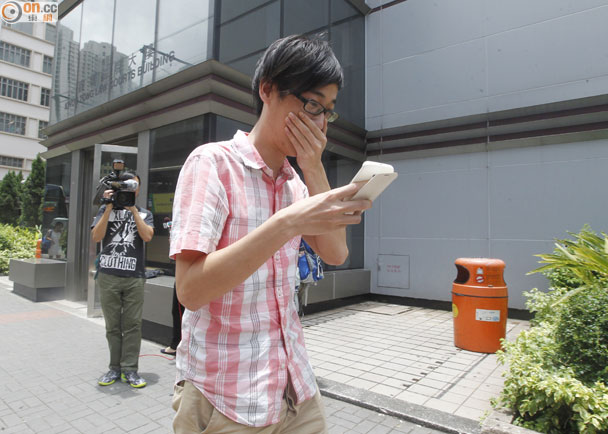
(Oriental
Daily) June 26, 2015. 27-year-old unemployed man Leung Chi-hang
was charged with disorderly conduct in public on October 17 in Mong Kok. The
police testified that he hurled insults at the police, said he "wanted to beat
the cops to death" and threw a metal barricade at the police. He was found
guilty as charged. However, the defense said that they have located a Cable TV
video which shows Leung doing something but not throwing any metal barricade.
However Cable TV claimed freedom of press and will not provide the video unless
there is a court warrant.
(The
Stand) July 23, 2015. Last month the defense found a new video as
evidence. Based upon the video, the magistrate ruled that the contents were
inconsistent with the testimonies of the police. The defendant did not lift the
metal barricade and his actions did not constitute incitement. Therefore the
magistrate found the defendant not guilty.
(HKG
Pao) March 14, 2016.
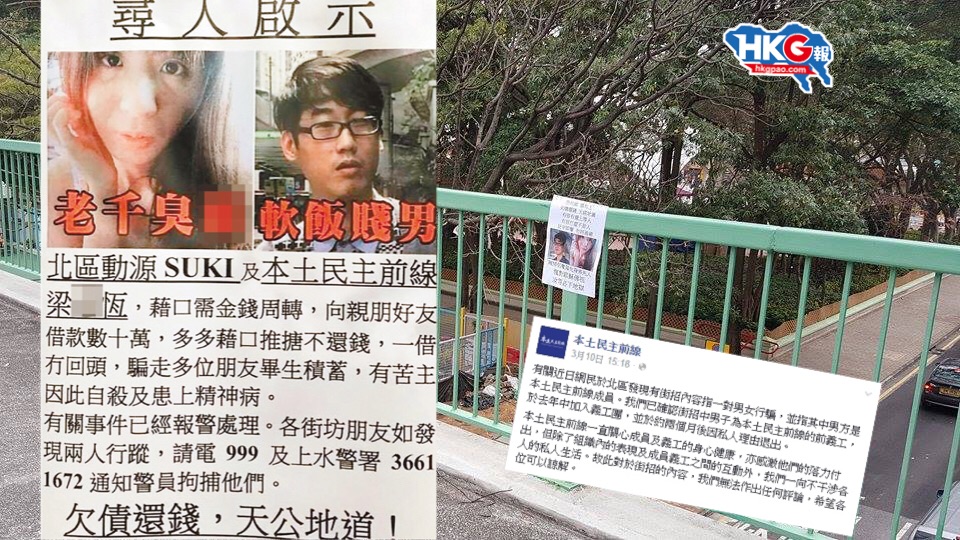
Recently a lot of street posters
were posted in North District against a couple of Hong Kong Indigenous who have
been borrowing money without re-paying. According to the 'wanted poster', North
of the Rings member Suki and Hong Kong Indigenous member Leung Chi-heng said
that they needed money and asked friends and relatives to lend them several
hundred thousand dollars. Afterwards they refuse to repay their debts. Victims
have lost their life savings, became mentally ill and even committed suicide.
Hong Kong Indigenous quickly
declared on Facebook that the individual Leung Chi-heng joined as a volunteer in
mid-2015 but left after two months. Hong Kong Indigenous said that they are
always concerned about the physical and mental health of their members and
volunteers, and the organization is grateful for their contributions. However,
the organization will not interfere with their personal lives and therefore
cannot comment on the street posters in North District.
North of the Rings announced on
Facebook that they have not yet been able to confirm that the woman in the
poster is the same as their member Suki. However, they acknowledge that they
have a female member named Suki who was in charge in administrative work but
left last August for personal reasons. North of the Rings said that they respect
her decision. However, they know nothing about her personal life and they will
not intervene either. As ex-fellow soldiers, the organization will attempt to
reach Suki and try to provide assistance. Since the complainant has already
reported to the police, North of the Rings will make no further comment on the
case.
Internet user Mandy Wong
commented: When your party member did something wrong, you say that this is a
personal matter and you get away without having to make any comments. When
someone else does something wrong, you want their whole family to die! That's
makes a lot of sense!

(Ming
Pao) May 19, 2015.
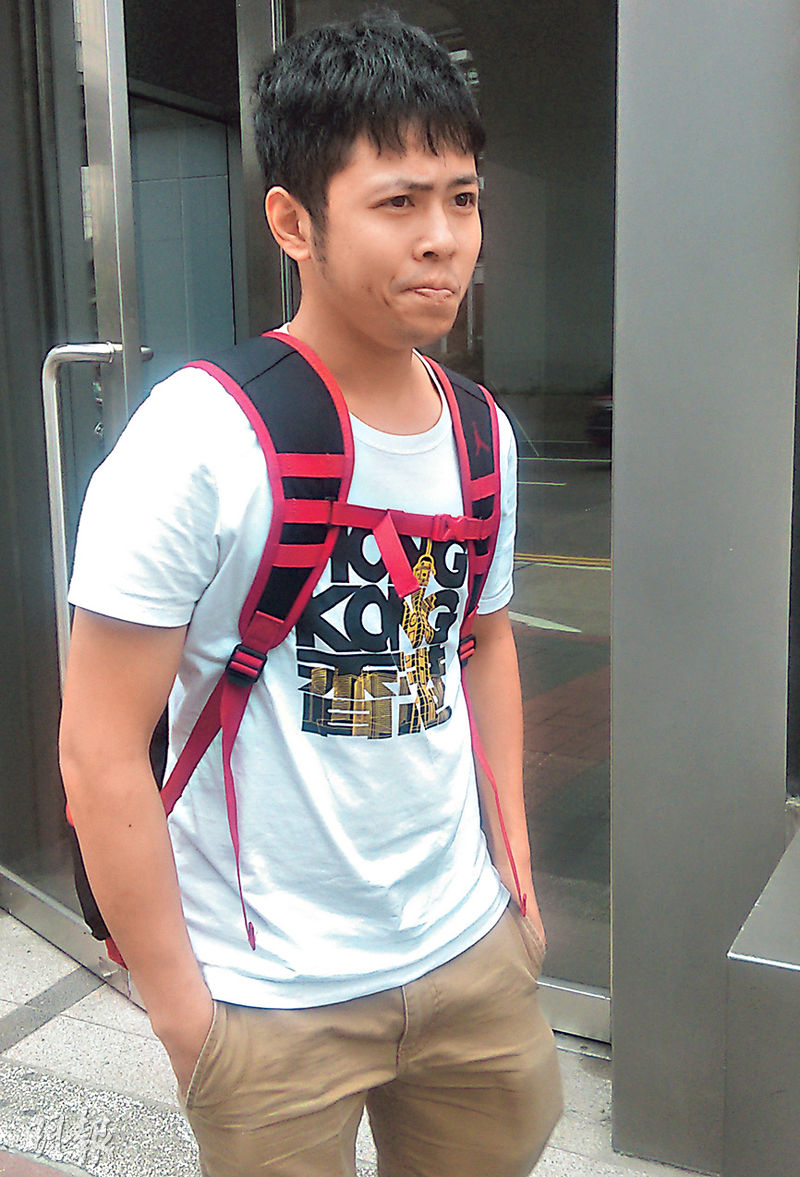
28-year-old transportation worker Tang Tak-chuen
was accused of interfering with police operations. On October 27, he was accused
of taking away the police baton of female police officer Wai Ching. According to
Wai, she was crossing the flower trough on the meridian of Nathan Road to go to
the southbound lane when Tang suddenly approached her, grabbed her baton and ran
away. She yelled and chased Tang. Tang ran for about 6 meters when several other
police officers arrived to arrest him.
The defense pointed out that Wai testified that
she wrapped the nylon cord on the baton twice around her wrist and therefore it
was impossible to take it from her, especially given that there was no sign of injury on
her wrist. The defense claimed that Wai jumped down from the flower trough and
clubbed Tang on the head with a blow coming down from above. Then she clubbed Tang again on
the neck. Because she used too much force, the club fell out of her hand onto
the ground. Then she slandered Tang for taking away her baton.
The defense then claimed that several male police
officers kicked and punched Tang, handcuffed him tightly to cause injuries on
his hands. The medical report showed that there were red spots on Tang's scalp
and wrists. The defense wanted to know the police guidelines on the use of
baton, but the magistrate ruled that this was not germane to this trial.
(Wen
Wei Po) July 4, 2015. After listening to the closing statements from
both sides, the magistrate deemed that the two police witnesses were reliable
and trustworthy whereas the defendant's testimony was not credible. Therefore
the magistrate found the defendant guilty. The defendant said afterwards that he
expected this verdict.
(Oriental
Daily) On July 22, Tang Tak-chuen was sentenced to four weeks in jail.
He posted $10,000 in bond and will appeal the sentence.

(Sing
Tao) May 26, 2015.
23-year-old Golden Forum
user Tam
Hiu-fung posted last October to incite others to join the illegal
assemblies of
Occupy Central. He wrote things such as "If you are a man, you should
take back Mong Kok" and "The MTR is the lifeline of Hong Kong so we have
not messed with
it. Since the government wants to continue to fool around, let's go all
the
way!" Earlier Tam had pleaded guilty to one charge of dishonest use of a
computer.
The magistrate pointed out that it
was very irresponsible for the defendant to make those statements on the
Internet, because people might actually take action as a result. The magistrate
asked: "Is this constructive and helpful for Hong Kong?" The magistrate
sentenced the defendant to 100 hours of community service.
(Oriental
Daily) May 11, 2015.
23-year-old BBQ meat restaurant
waiter Tam Hiu-fung used his iPhone to post messages on the Golden Forum last
October 17. He incited others to join an illegal assembly, "Three stages of the
weekend counter-offensive: Take Mong Kok for the fifth time; take Lung Wo Road
for the sixth time; occupy Central during the day." He also wrote: "If we cannot
re-take Mong Kok, then we'll purchase tickets and enter the MTR to wait for the
train." The police came across these posts made by the individual known as Lee
Siu-ming, tracked down the IP address and arrested Tam at the waiters'
dormitory.
(New
York Times) October 28, 2015.
At 6:49 a.m. on Oct. 17, not long after
the police completed a predawn operation to clear a volatile protest camp
in Hong Kong’s densely populated Mong Kok neighborhood, someone posted a
“call to action” on a popular online forum, urging residents to retake the
streets.
“Tonight, if you’re a man, let’s revive
Mong Kok,” a user calling himself Li Siu-ming wrote on the HKGolden
website. “If there are no other options, we will have to blockade the
railway station, paralyze the MTR,” he added, referring to the city’s
subway system.
There was little to distinguish his posts
from others online about the pro-democracy demonstrations that have
disrupted Hong Kong for more than a month. But the next day, the police
demanded user data related to his messages, according to HKGolden’s
manager.
Several hours later, officers arrested a
23-year-old man at his home, saying he had “incited others on an online
forum to join the unlawful assembly in Mong Kok, to charge at police and
to paralyze the railways.” In announcing the arrest, a police spokesman,
Hui Chun-tak, made a sweeping assertion: It is a crime in Hong Kong to
post messages calling on people to attend the protests.
“I stress, inciting others to commit
criminal acts on the Internet is illegal,” he said.
The warning, along with a refusal to
disclose more information about the case, has heightened fear that the
authorities in this former British colony have begun to police the
Internet using methods more often associated with the security forces in
mainland China, where web censorship is routine and a crackdown on online
dissent has been underway for more than a year.
The police have declined to provide the
exact language that prompted the arrest or to confirm any link to the
messages posted on the HKGolden forum. But Joe Lam, the site’s chief
executive, said officers had demanded that he provide them with the
Internet Protocol addresses and messages associated with the Li Siu-ming
account.
In addition to the call to paralyze the
subway system if necessary, the user urged protesters to “force the police
to use force” when retaking the Mong Kok site. After protesters succeeded
in re-establishing the camp, he got back online and suggested at 1:57 a.m.
on Oct. 18 that they “charge Lung Wo,” referring to a street outside the
Hong Kong government’s office secured by the police.
But the next day, he reported that
officers had come to his home and arrested him for messages supporting the
protesters. “I just got home after giving a statement,” he wrote. “So
gloomy. Technology Crime Division. Be careful.”
The police have identified the suspect
only by his surname, Tam, and said he had been released on bail pending an
investigation. Mr. Tam initially sought the help of a group of lawyers and
volunteers associated with the protest organizers; they said his full name
was Tam Hiu-fung.
In a private message on the HKGolden
site, the person using the account declined to comment but confirmed his
name was Tam Hiu-fung. “I don’t want to go into details about my
background. It’s not important,” he said when reached by telephone. “I’m
an ordinary Hong Kong youngster. I just want to do something for Hong
Kong.”
It is unclear what drew the police to Mr.
Tam. The pro-democracy movement has relied heavily on social media and
messaging apps to organize and mobilize protesters, and statements urging
people to turn out for the demonstrations or even to confront the police
are rife on local websites, as well as on Facebook and Twitter.
Messages advocating violence are less
common but can be found among both protesters and those who support the
government, raising the question of selective prosecution.
“Open fire and kill those animals.
Watching it makes my blood boil,” one Facebook user opposed to the
protests wrote on Oct. 16, commenting on a video of a clash between
demonstrators and the police.

(Oriental
Daily) June 11, 2015.
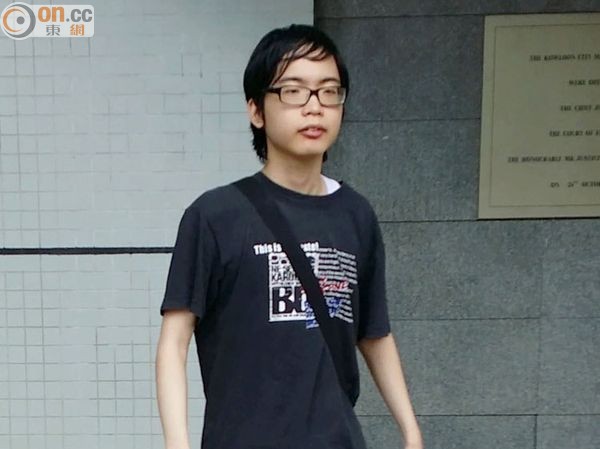
20-year-old man Leung Chi-wai was
charged with assaulting a police officer on November 25 in the Occupy Mong Kok
area. According to the police officer Choi Hong-kai, he heard the defendant
Leung yelled "Charge!" and then charged at the police line. Leung then fell on
the ground when he ran into other police officers. Leung started struggling
on the ground. Choi went up to subdue him and got kicked twice. Eventually Choi
subdued Leung.
Upon cross-examination, the
defense pointed out that Leung was wearing a helmet and goggles at the time but
Choi said he did not. Furthermore, the defendant claimed to be tackled by
policemen, hit with batons and cursed out with obscene language, but Choi said
it did not happen. The defense then played a video. Choi agreed that the video
was taken at the scene. The video showed a man being tackled onto the ground by
the police. Choi agreed that the man wore the same clothes as the defendant at
the time of arrest. However, Choi was not sure about the time when the video was
taken.
(Sing
Tao) June 11, 2015. The defense played two videos. One was provided by a
Golden Forum user and another one was found on YouTube. In those videos, a man
in blue jeans and camouflaged top was suddenly dragged out of the crowd by
plainclothes policemen. Someone yelled: "Fuck your mother! Wearing a helmet?
Hold him!" At three to four policemen rushed up to subdue this man. When asked
whether this was the defendant, the witness Choi said "very similar." The
defense said that the situation that day was that the defendant was not leading
any charge, but he was suddenly pulled out by the police, hit a couple of times
on his legs and then subdued. Choi said that he did not see such thing.
The defendant Leung Chi-wai said
that he was demonstrating in Mong Kok. At Shan Tung Street, he was pushed by the
crowd to the front row and suddenly plainclothes policemen pulled his helmet,
pushed him on the ground and subdued him. He said that he did not kick any
policeman. After viewing the two videos, Leung said that he was the individual
who was subdued in the video. He said that he did not see Choi in these videos.
(Oriental
Daily) June 30, 2015. The magistrate said that the policeman's testimony
was not credible. First Choi testified that he saw the defendant saw him
approaching and kicked him. However, Choi was unsure whether there was eye
contact. Furthermore, there was discrepancies between the video and the
testimony. Therefore, the magistrate ordered the defendant discharged as not
guilty.

(Wen
Wei Po) June 12, 2015.
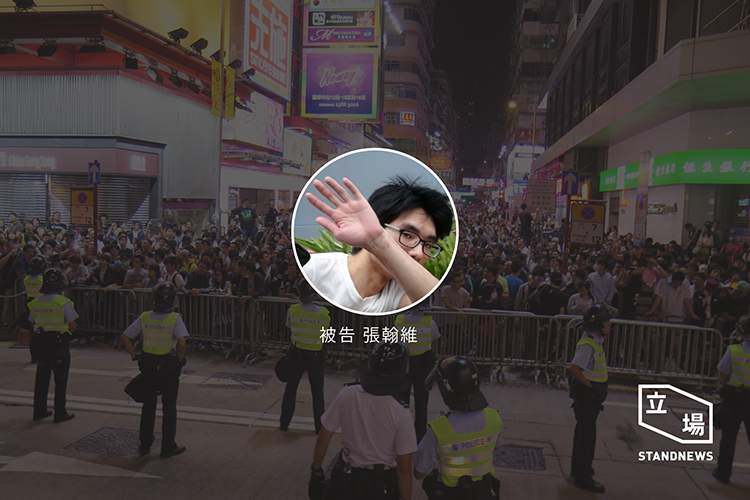
On October 17 during the illegal
Occupy Mong Kok period, the police was enforcing crowd control at the
intersection of Shan Tung Street and Nathan Road. 26-year-old part-time interior
decorations worker Cheung Hon-wei suddenly gave a big shout, charged at a police
van, jumped up to take a flying kick at the van door. Two scratch marks were
made on the van door. The police subdued Cheung and charged him with criminal
destruction of property. At the trial, the defendant said that he had no idea
why he kicked the police van. He apologized to the police and said, "I am making
a public apology to the police. I deeply regret (what I did)." Cheung was
allowed to post a 15-month good behavior bond for $2,000. He also has to repay
the police $480 for the car repair work.

(Oriental
Daily) June 16, 2015.
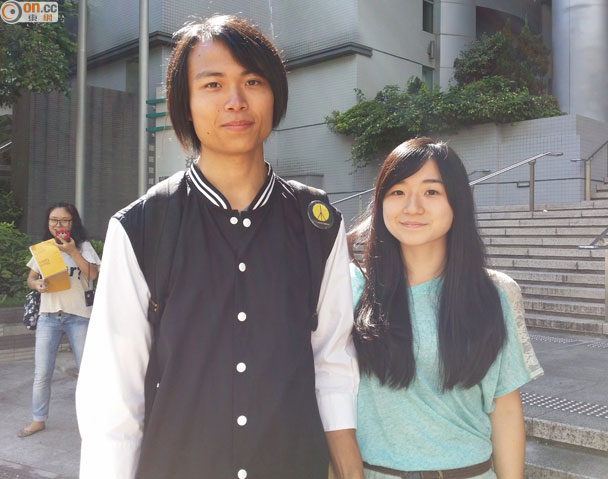
22-year-old musician Marco Lee was
accused of assaulting a police officer on Lung Wo Road, Admiralty on October 18
last year. Two police officers testified. One of the officers was hit by a water
bottle while the other officer observed the defendant throw that bottle. Because
there were large numbers of demonstrators and photojournalists filming, there
was no chance that the two officers corroborated on the evidence.
The defense pleaded that the
defendant attends church and volunteers to teach in prison. Furthermore, the
defendant is not a violent person and did something unusual this time out of
political fervor. The magistrate said that the court must send a message to the
public that police will be protected while on duty. Therefore, the magistrate
sentenced the defendant to four weeks in prison. He is currently out on $500
bail pending appeal.
(Apple
Daily) June 5, 2015. After being found guilty, Marco Lee explained that
he and his girl friend joined the demonstration. At the time, the police had
forced the demonstrators off Lung Wo Road. Amidst the chaos, he was suddenly
grabbed from behind by policemen. Two police officers came up and pushed him
down on the ground. He said that he was hit in the leg by a hard object. "One of
the policeman knelt on my chest five to six times." He found it hard to breathe
and could not fight back. About five policemen surrounded him. He was handcuffed
and taken over to Government Headquarters. A plainclothes policeman dragged him
by the handcuff and told him to hurry. His forearm was injured as a result. He
said that the doctor at the hospital told him that he had a broken bone.
However, the medical report indicated only that he had scratch marks on his left
shoulder. The defendant said that the police used violence on him to release
anger. Prior to that there had been many instances of police assaulting
demonstrators. The defendant was frightened by the police that day.
(Wen
Wei Po) June 17, 2015. The magistrate said that on October 18,
demonstrators attempt to break through the police line and occupy Lung Wo Road.
Sergeant Fong Wai-kay was hit in the back by a hard object. Another police
officer Hui Hing-sing observed the defendant Marco Lee tossed the water bottle
and therefore went to make the arrest. Lee kicked Hui in excitement. Other
police officers came and helped to subdue Lee.
The defense claimed that the
police made false charges against Lee in anger. But the magistrate said that the
testimony of the two officers could not have been improvised at the scene. Also,
Lee's claimed injuries did not match the medical report. When Lee was subdued,
he asked the police whether he was arrested. This is not a reasonable reaction
for an innocent person. Therefore, the magistrate said that the defendant was
not honest and trustworthy and therefore he rejected his testimony. The prison
sentence was imposed because the defendant showed no remorse for his deed.
(Oriental
Daily) February 24, 2016. Marco Lee based his appeal on the assertion
that the magistrate should not have disallowed his own testimony during the
initial trial. However the High Court judge immediately rejected his appeal and
sent him to jail immediately for four weeks.
(Headline
Daily) February 25, 2016. The appeals judge said that Lee said at one
time that he did not resist arrest and at another time said that he was arrested
after some struggling. So his testimony was self-contradictory. The judge said:
"I don't see anything wrong with the magistrate not trusting him. I don't even
trust him."

(Oriental
Daily) June 19, 2015.
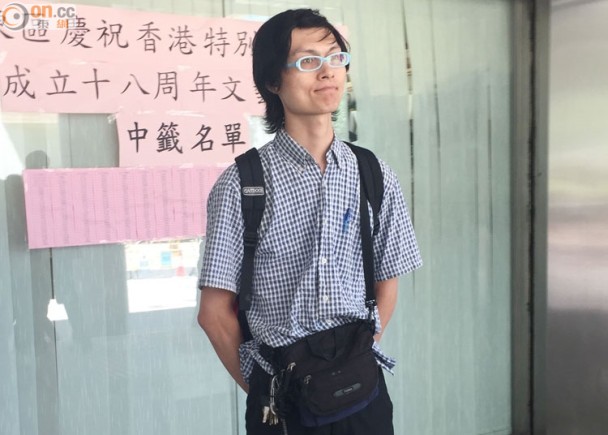
32-year-old courier delivery man
Man Chi-wai was charged with obstructing the police. He was standing on the
electricity transformer station in Tamar Park and he refused to follow police
instructions to leave on October 15.
Man claimed that he wears
eyeglasses for his "900 degree myopia." On that day, he wore a surgical mask and
he climbed on of the electricity transform station in order to get a clearer
picture. He did not chant any slogans and he did not display any banners. At
around 2am, a policeman told him to come down to be arrested. Because the
transformer station was pretty tall, he could not come down immediately. He
asked the policeman to help him, but was turned down. Eventually he came down
and two policemen dragged him to the wall. He was asked to face the wall, raise
his hand, lower his hands, squat down and then lie face down on the ground.
Several policemen then punched and kicked him. The police then tied his hands up
with plastic bands and took him into an unmarked car. The police cursed him out
with foul language. He was then taken down to the police station. He insisted
that he did not obstruct the police.

(Oriental
Daily) June 19, 2015.
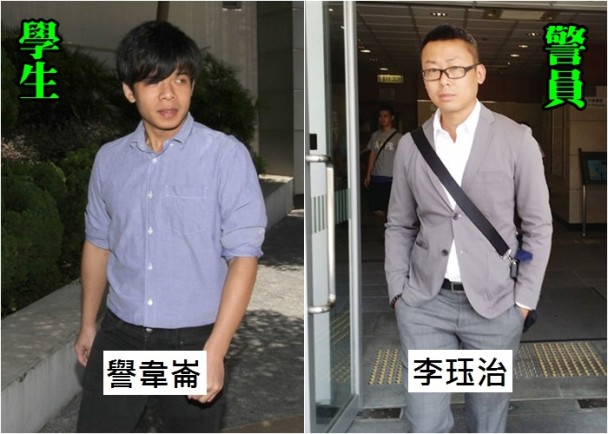
19-year-old Yu Wai-lun joined
Civic Passion and Hong Kong Indigenous Democratic Front in the anti-parallel
trader demonstration in Yuen Long on March 1. At around 6pm, Yu put on an
armored glove and punched police officer Lee multiple times. Lee arrested Yu
immediately. Later, Lee underwent medical exam and was shown to have sustained
injuries on his left arm, shoulders, upper back, groin and lower leg. The police
also found body armor and knee guards in Yu's backpack.
The magistrate said: "Have young
lads like you been watching too many movies and cartoons? Were you going
to put on the armor and become a martyr?"
The defendant Yu had just
completed his DGSE exam. He pleaded guilty to one charge of assaulting a police
officer. He bowed to the police officer Lee and said: "Sorry for causing bodily
harm to you. I promise that I won't do this again."
The defense lawyer said that Yu is
the only son of the family. Yu has just completed his DGSE exam and plans to
attend university. Yu does not belong to any political party and he has
reflected on his actions. He promises not to participate in any such action in
the future. Yu really wants to attend his graduation ceremony. Furthermore, he
serves as a swimming coach at an international school and therefore wants to be
bailed out.
(HKG
Pao) July 7, 2015.
In mitigation, the defense pleaded that the
defendant was discriminated against in school due to his obesity. Today, the
defendant realizes that the anti-parallel trade movements have created
discrimination against mainlanders and parallel traders. Therefore the defendant
hopes for a lenient sentence. Furthermore, the defendant is well-behaved at home
and in school.
The magistrate Shui Kai-lai said that the
defendant is a young person that society will rely on in future. Therefore he
sentenced the defendant to a 12-month probation order.
(The
Stand News) July 6, 2015.
Outside the courthouse, Yu Wai-lun told the
press that he does not regret taking part in the anti-parallel traders
movements, but he is sorry to have assaulted the police officer. He said that he
has not considered whether the anti-parallel trade movements is discriminatory
against certain parallel traders. Will he participated in similar actions in
future/ He said that he does not know.

(Oriental
Daily) June 29, 2015.
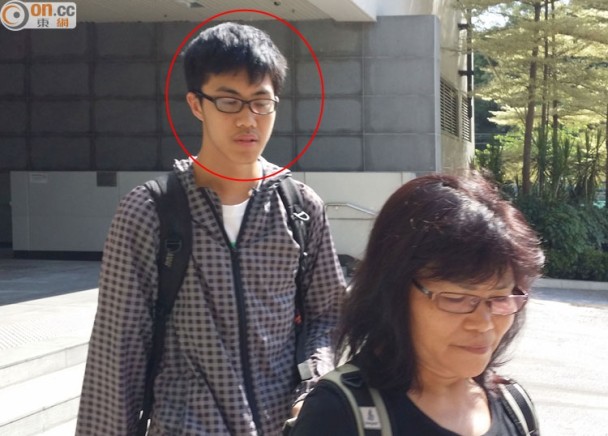
16-year-old student Fung Tsz-ho
was charged with assaulting a police officer on March 1 in Yuen Long. At the
time, there was a demonstration against parallel traders. Organised Crime and
Triad Bureau officer Lee Wang-tat was in plainclothes with a police vest
dispersing the crowd out the McDonald's. Lee claimed that the defendant pushed
the door from the inside, hitting him thrice on the elbow. The defendant also
cursed him out as a "Police dog." Lee said that he had explained to the
defendant that "the police are working, please do not push anymore." However,
the defendant did not stop. Therefore he believed that the defendant was
intentionally pushing the door at him and he made the arrest accordingly.
(Wen
Wei Po) The defendant denied the charges. He said that he was in Yuen
Long that day because he is "interested in current affairs" and wanted to
understand better. He also wanted to offer "spiritual support." At the time, the
police used pepper spray at the crowd, which carried him inside the restaurant.
Then he saw some people with raised batons outside the restaurant so he wanted
to go out and "understand" things more. But when he pushed the door, it hit
someone.
Fung said that he is hearing
impaired and requires a hearing aid which he was not wearing at the time. He
said that he could hear what the policeman was saying. He took one step back and
the police rushed up to knock him down and handcuff him. That was when he
realized that those people were policemen. He also denied calling police officer
Lee Wang-tat a "police dog."
The defense lawyer said that when
Fung first pushed the door, the angle reached only 70 degrees and he did not
make it out of the restaurant. Therefore, Lee's testimony is suspect. It was
also said that Lee was in plainclothes and the defendant may not have seen the
word Police on the vest from that angle. Therefore, Fung accidentally opened a
door that hit Lee and there was no deliberate intention to assault the
policeman.
(SCMP)
July 10, 2015. A hearing-impaired secondary school pupil was yesterday cleared
of pushing the door of a fast-food restaurant and hitting a policeman amid
chaotic scenes during a protest against parallel trading in Yuen Long.
Acquitting Fung Tsz-ho, Tuen Mun magistrate
Kelly Shui said she could not rule out the possibility that the 17-year-old
opened the door and accidentally hit officer Lee Wang-tat. She also could not
be sure if Lee was hit by other people at the scene, or if he was being
oversensitive as the area outside the McDonald's restaurant was crowded.
The court was told that Lee in plainclothes,
wearing only a police vest, was deployed to disperse protesters who were
gathering outside the restaurant to protest against parallel trading. Fung was
inside the restaurant at the time when police started pepper-spraying
protesters, Shui noted.
Fung had earlier pleaded not guilty to one
count of assaulting a police officer.
During the trial, Lee accused Fung of "opening
and closing" the front door of the restaurant at very fast speed as the door hit
him three times. Outside court, Fung, who will sit public exams next year, said
the trial had wasted his time as he had to miss some classes. He added that he
was not aware that Lee was a police officer.

(Sing
Pao) June 30, 2015.
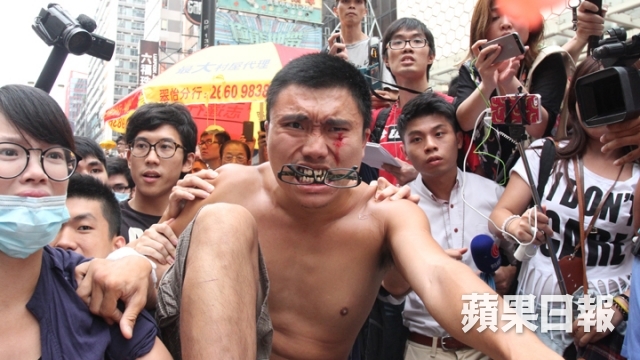
27-year-old Eric Poon (nickname
"Hexagonal wrench") has been arrested by the police. Poon is suspected of having
accosted a girl under the age of 16 and offered to show her some paintings. Then
he kissed her against her will. The girl lodged a complaint with the police.
(Wen
Wei Po) July 1, 2015.
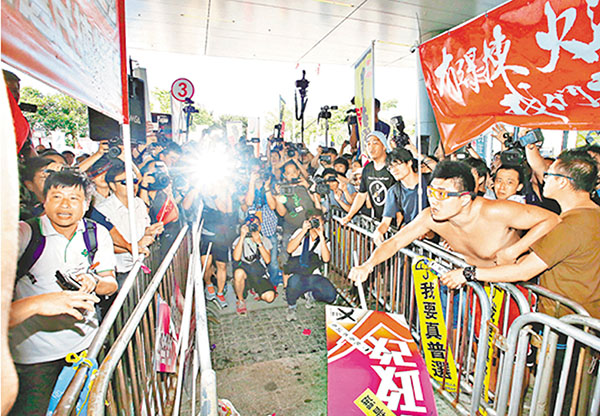
Eric Poon showing his form with spitting, cursing
and making obscene gestures
On June 11 2015, a fourteen-year-old
girl was molested by a man under the pretext of showing her some paintings. Her
mother learned what happened and filed a police complaint on June 25. According
to the court records, a man with the same name (Poon Won-tong) was found guilty
of raping/molesting a 14-year-old girl in Tuen Mun in June 2006 on three
separate occasions (in a parking garage platform, a restroom for handicapped
persons in a recreational area and in a parking garage stairwell). At the time,
the defense claimed that the defendant had previously sustained an injury to his
brain and therefore he has sub-normal intelligence.
(The
Sun) July 14, 2007. A 14-year-old runaway girl was raped/molested thrice
by a young man named Poon Won-tong on three occasions, once on a table tennis
table for the public in Shan King Estate parking garage, once in a public
restroom for physically handicapped persons in Yeung King leisure park and once
in the stairwell of the Shan King Estate parking garage. On the first occasion,
the defendant tied up the girl and raped her on top of the table tennis table.
On the third occasion, the man forced the girl to commit fellatio. On one
occasion, there was a under-aged male who watched the rape while fondling the
girl. The defense claims that the defendant is mentally retarded due to brain
damage.
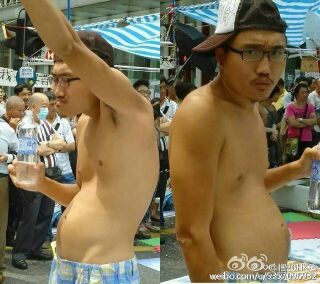
(Apple
Daily) July 14, 2007. According to the defense lawyer, the defendant
dropped out of secondary school Form 3. His parents got divorced last year. Last
October, the defendant was taken to mainland China to live with his maternal
uncle to learn interior decoration. After the police contacted his father over
this case, the father went to mainland China and took the defendant back to Hong
Kong to turn himself in to the police. According to the prosecution, the
defendant and the victim agreed to run away on June 6. On the same day, he took
her to the platform in the Shan King Estate parking garage and asked for sexual
intercourse. She refused. He used a towel to tie her hands up and carried her
onto the table tennis table to rape her. Afterwards, the defendant took her into
the public restroom for physically handicapped persons in the Yeung King Road
leisure park. At the time, a 14-year-old boy asked to be allowed to watch. So
the defendant removed the victim's clothes, used a towel to tie her hands up and
raped her. On the same day, the defendant woke the victim up in the parking
garage stairwell and forced her to engage in fellatio.
(Oriental
Daily) July 29, 2015. At 3pm on May 21, the defendant Eric Poon got into
an argument with a worker on the fourth floor of the Fa Yuen Street Public
Library. The worker asked Poon to be quiet, but the Poon said: "If you don't
know who I am, I will tell someone to beat you to death." The defendant was
found guilty of criminal intimidation and sentenced to three months in jail.
Video:
Eric Poon looking for a one-to-one fight at the Mong Kok Public Library.
0:55 Poon: You shut up! Leave!
1:05 The other man who is a head shorter than Poon: Leave? How can I leave? You
are blocking my way!
1:07 Poon: Leave! Fuck your mother! Are you scared? Let's have a one-to-one
fight!
(Wen
Wei Po) August 1, 2015. On January 3, 2015, Eric Poon is suspected of
injuring a male pedestrian named Law inside Hollywood Plaza (Mong Kok). Poon has
been charged with one count of common assault.
(Oriental
Daily) August 15, 2015. The trial of Eric Poon on charges of sexually
molesting a female minor will be held on October 5. The defendant Eric Poon
pleaded not guilty. The prosecutor said that there will be four witnesses.
Because the victim is a minor who was sexually assaulted, she will testify by video conference. The
prosecutor said that the defendant is serving three months of jail sentence for
criminal intimidation while still awaiting trial for three other cases. Since
the defendant had been known to skip bail before, the prosecutor asked that the
defendant not be allowed to bailed out. The magistrate ruled that the defendant
will be detained until the trial.
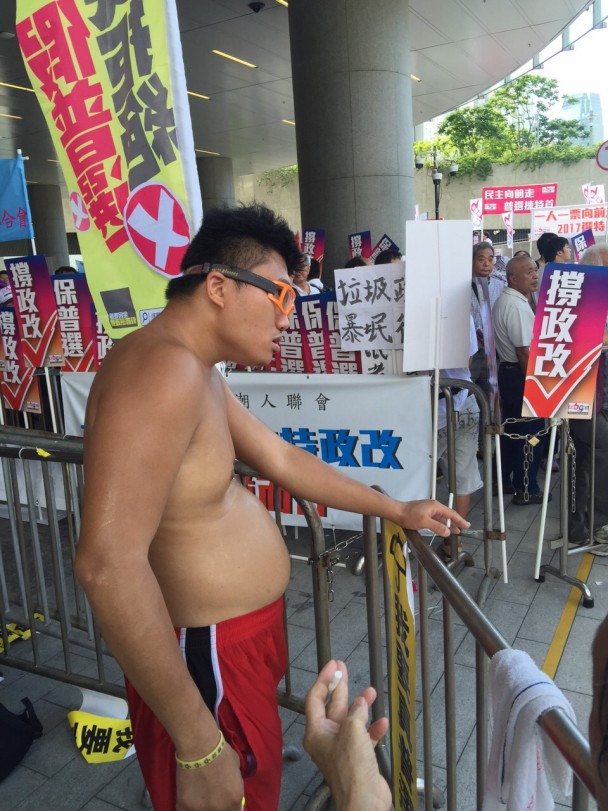
Video: Eric Poon lying down on the
ground and being interviewed by Simon Ng. He equates the 87 tear gas canisters
in Admiralty with the June 4th 1989 incident. The closing comments: "What is
your name?" "Eric" "Everybody please support Eric and donate more money."
Video:
Unidentified man punched Eric Poon in the eye with a straight right.
Video:
eetv interviewed Eric Poon about being injured on his eye previously. "It was
around 3:50pm on October 22. I was over there by the intersection of Dundas
Street and Nathan Road. A group of people who claimed that they were bailiffs
... they claimed themselves ... that is to say, they are fakes. They dismantled
our roadblocks. About ten of them. There were more of us than them." "If there
were more of you, then how did you end up bleeding in your eye?" "We wanted to
pull the iron barricades back. Then there was was a Green Ribbon who wore
grey sunshades. He held scissors. He cut up our stuff to take away. I pushed
him. After I pushed him, I scratched his eyeglasses because I had longer arms. I
wanted him to show his face. He was displeased. He hit me and broke the left
side of my eyeglasses. That was right in front of the police. The police didn't
care." "Did you ask for police assistance?" "Yes, then we went down to the
police station. The police released him immediately. I saw it. My friends saw
it."
Video: Eric Poon and Ng Ting Pong
expounding on the finer points of democracy in Occupy Mong Kok area.
Video:
Eric Poon has a confrontation with a Hong Kong Broadband salesman outside
Hollywood Plaza on Sai Yeung Choi Street South, Mong Kok
Video:
Eric Poon using a megaphone to scream obscenities
Video: Eric Poon bullies a woman as he slaps her hard in the head. When
others tried to get him to stop, he said: "Shut up! It's family business!" The
woman said: "I really did not borrow any money." But Poon said: "No? You stole
my money until there's only 24 dollars left." A person came up to intercede but
Poon pointed two fingers at him and said: "None of your business. It's a
personal matter." Although there were many Yellow Umbrellas around, nobody
stopped Poon who left on his own.
Video: Eric Poon being forced to pack up and leave his Sai Yeung Choi
Street South site. He was not the only person asked to leave. As the
plainclothes policeman noted: "Arrested five times previously ... a psychiatric
hospital record ... sex crimes record ... various people have made 130
complaints against him ..."

(Oriental
Daily) July 3, 2015.
Last November, police superintendent
Franklin
Chu took part in the Solar Peak operation to deal with the Occupy
demonstrators. From November 28 through December 1, he received a large number
of harassment calls on his mobile telephone and home telephone. He lodged a
complaint to the police. The police checked the calls with the
telecommunications service providers and tracked down two individual callers.
28-year-old male moneychanger store owner's son
Kwong Kai-hong made 37 calls on December 1, including 14 calls within one hour
to the home telephone of Franklin Chu. On Kwong's telephone, Chu's number was
entered on the contact list as "Spasm Chu." 22-year-old university female
student Poon Sheung-yin made 30 calls within three days. Both individuals had
attempted to use the "133" prefix to conceal their own caller ID's.
The defense said that the two defendants are
first-time offenders and do not realize that it is a crime to make harassing
telephone calls, which were "unwise" and "stupid." The defense also said that
the two defendants learned from the Internet that this superintendent had
clubbed demonstrators and they got "over-enthusiastic" and used the Internet
forum information on Chu to call the superintendent and "tell him that he was
wrong."
The magistrate disagreed with the defense's
explanation. "No matter how noble the motives were, it is wrong to do this."
Furthermore, the calls to Chu's home are deeply annoying to his entire family.
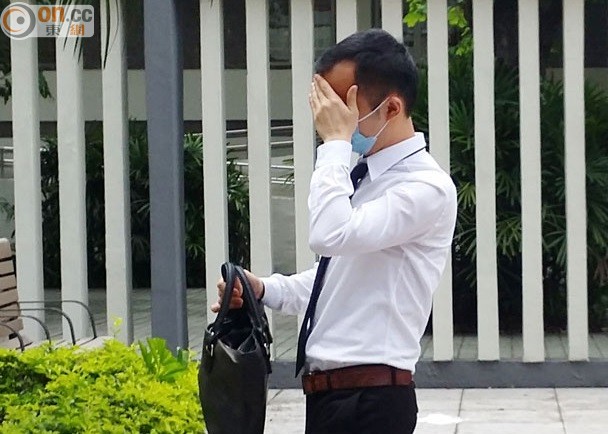
Defendant Kwong Kai-hong
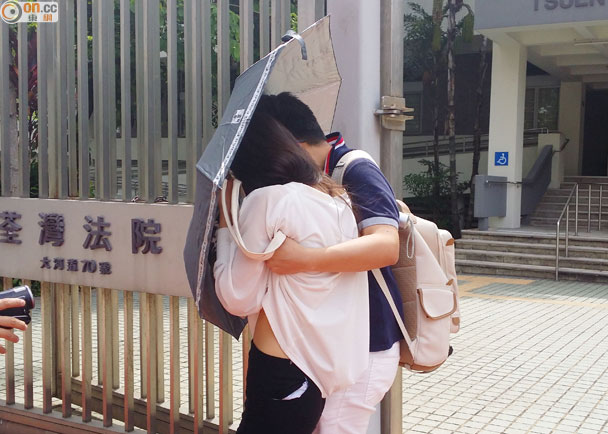
Defendant Poon Sheung-yin
(SCMP)
July 4, 2015.
A man and a woman admitted making dozens of
telephone calls over four days last year to harass a police officer who was
shown on television news beating an Occupy movement supporter, a court heard
yesterday.
Kwong Kai-hong, 28, and Esther Poon Sheung-yin,
21, each pleaded guilty to two counts of making persistent phone calls to
then Sha Tin divisional commander Franklin Chu King-wai, who took part in
the "Solarpeak" operation during the Occupy sit-ins in Mong Kok last year.
Chu received one anonymous call after
another on his residential landline and mobile phone between November 28 and
December 1, Tsuen Wan Court heard. No caller identity was displayed for most
of the calls.
"The frequency of the telephone calls was
annoying to [Chu] and he reported the case to the police," prosecutor Kalina
Wong Suk-lan told Magistrate Rita So Ka-yin.
Local media reported that Chu retired after
the footage capturing his action against Occupy supporters went viral on the
web. Poon found Chu's phone numbers in a post on the HKGolden.com forum, the
court heard.
According to records on Kwong's mobile
phone, 14 calls were made to Chu's residential landline and 23 to his
cellphone on November 28 and 29. Police arrested Kwong and seized his phone
on December 22, Wong said. The officers found Chu's numbers saved as a
contact under the name of "Chu King-luen".
Poon made 19 calls to Chu's residential
landline and 11 calls to his mobile phone between November 28 and December
1. She admitted to police under caution that she rang Chu more than 10 times
with a view to "punishing and harassing" him, Wong said.
In mitigation, the pair said they cared
about what happened in Hong Kong and had committed the crimes on impulse.
So said that regardless of what they saw in
the television footage and however noble their motive, the way they handled
the matter was inappropriate. The magistrate said they should instead have
raised any concerns they had with the relevant authorities. She
adjourned sentencing to July 17, pending probation and background reports.

(Apple
Daily) June 25, 2015.
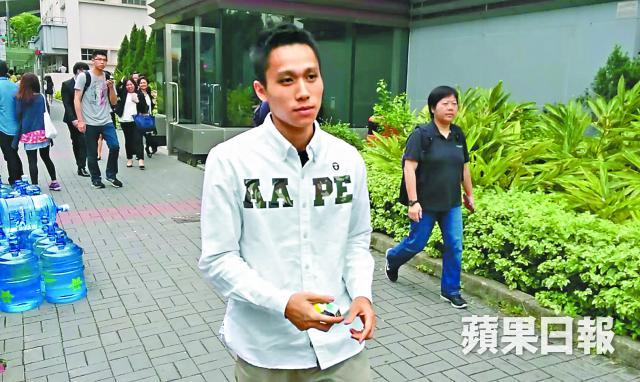
According to police officer Shum Chun-yin, he was
on duty outside Wai Fung Centre at the intersection of Nathan Road and Argyle
Street at around 7pm on October 17, 2014. Shum observed that 25-year-old porter
Wong Hiu-sing claiming to have been hit in the eyes by pepper spray. At the
time, other persons offered Wong water and paper tissue to wipe his face. The
defendant cleaned up while complaining that police used the pepper spray with
neither cause nor warning.
Shum testified that after cursing for two minutes,
Wong glared at him and yelled: "Fuck your mother, you goddamned
policeman!" Then Wong threw the wet towel at Shum, hitting him right in the
nose. Shum and another police sergeant arrested Wong for assault. The defendant
fended Shum off and used his shoulder to ram Shum in the chest. The two fell
down on the ground. Shum felt pain, and realized that his shoulder has been
dislocated. Upon cross-examination, Shum admitted that the police report did not
contain anything about being rammed with the shoulder. "It's my fault for not
being sufficiently detailed." He also said: "By the time that I got to the
hospital, my chest didn't hurt much. My arm was really hurting."
The defendant said that he was on the way home
after work. When he got to this location, the police had blocked off the road. He
waited 10 minutes without going anywhere. He was relatively calm but other
people around him were cursing the police non-stop. Suddenly the police sprayed
him. His eyes were still hurting after he cleaned. "I couldn't see anything. I
was innocent. I got upset and I threw the paper towel. Then I got held. I didn't
know who they were. I did not want anyone touch me, so I struggled. I did not
intend to assault or resist the police. " The defense pointed out that the
defendant did not participate in Occupy Central.
The magistrate said that although the policeman
failed to recorder the shoulder thrust on the chest, this was not a critical detail and
did not affect his credibility. By contrast, the defendant's court testimony was
inconsistent with his statement to the police in many places. The defendant also
has four prior convictions. Therefore, the magistrate found the defendant guilty
and sentenced him to seven days in jail.
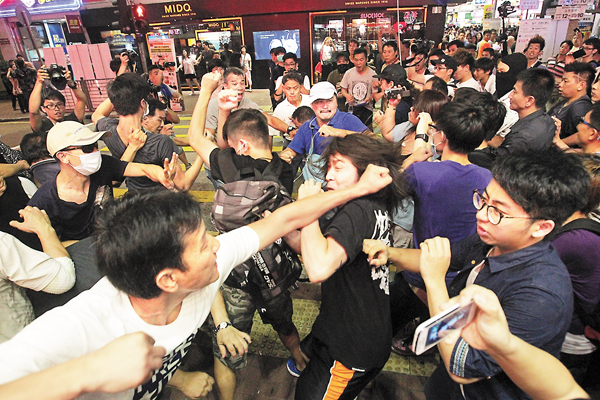
(SCMP)
Police use pepper spray as Hong Kong protesters clash with 'pro-China' group in
Mong Kok. June 29, 2015.
Police arrested five people and used pepper
spray to try to disperse violent clashes in Mong Kok last night as localist
demonstrators protested against a group of people singing in Putonghua,
creating a fraught situation that quickly spun out of control when rival
pro-Beijing demonstrators clashed with the localists. Four men and one woman
aged between 23 and 55 were arrested, police said, and one police officer
was reported injured. Dozens of anti-mainlander demonstrators targeted the
musicians, who regularly assemble in the pedestrian area of Sai Yeung Choi
Street South, accusing them of causing a nuisance.
"Localist" has become an umbrella term for
radical groups defined by an anti-mainland sentiment and a desire to resist
Beijing's influence over the city.
As word of the protest spread, rivals from
patriotic groups arrived, and soon heated verbal arguments broke out, later
escalating into physical clashes. Scores of police officers had been
standing ready for the protest by the localists, who had announced their
intentions in advance. When the two sides began to clash, police deployed
metallic barricades as partitions to try to keep them apart.
The situation took a particularly violent
turn when officers removed a man from the crowd and carried him into a
police vehicle at about 8pm. Localist
protesters surrounded the police vehicle on Nathan Road, and officers fired
pepper spray at them, hitting several.
The two sides later returned to Sai Yeung
Choi Street, where angry verbal exchanges continued for about an hour,
followed by chases on foot and physical struggles. Workers from some shops
on the street shut their metal gates, apparently to prevent damage.
The chases and fights later spilled into
nearby Mong Kok Road, where officers were seen using pepper spray again. A
man with his face covered with blood was spotted leaving the scene with the
assistance of a woman.
Police were seen helping some apparent
participants of the melee into a taxi, angering the localist protesters, who
accused them of releasing the perpetrators of crimes. As of 12.50am, about
dozens of the localist protesters gathered outside Mong Kok Police Station
and called for the release of their fellow protestors taken away by the
police.
(Oriental
Daily with video) June 28, 2015 20:07
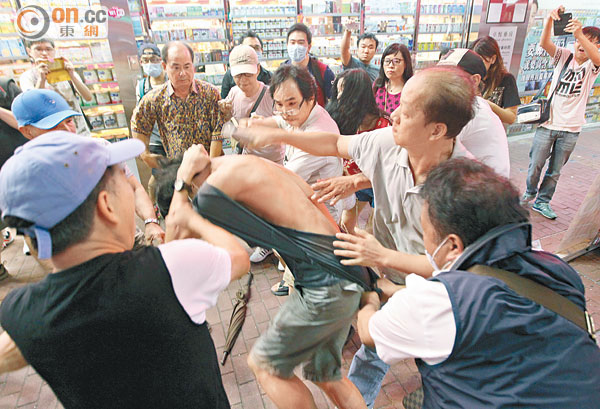
Almost one hundred demonstrators demanded
that the Chinese middle-aged women stop singing and dancing on Sai Yeung
Choi Street South. They said that the Chinese middle-aged women's "country
music" and "Red songs" are sung in "bandit language" (=putonghua) and
represent a form of cultural cleansing that destroys respectability.
The demonstrators emphasized that they were
gathering peacefully, but several dozen of them rushed at the Chinese
middle-aged women and rained obscene curses upon them. Several dozen
uniformed police officers were present to maintain order and separate the
sides.
I Care Action founder Anna Chan showed up
around 8pm, raised a Chinese national five-star flag, smiled and said
nothing. The demonstrators heaped obscenities, but she declined to respond.
The police set up a ring of metal barricades around her.
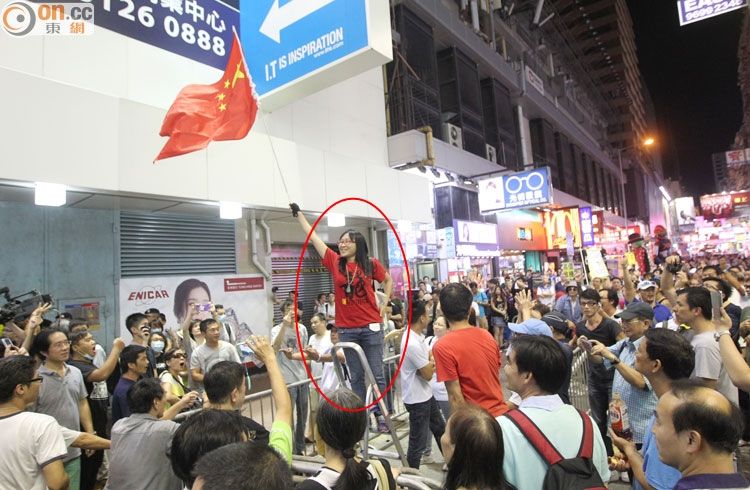
(Oriental
Daily) June 28, 2015 20:56.
Several dozen Localist
demonstrators held a demonstrators against the middle-aged Chinese female
dancers on Sai Yeung Choi Street South, Mong Kok district. There were multiple
clashes, with people bleeding from injuries. At around 9pm, Caring Hong Kong
Power member Anna
Chan counter-demonstrated and the Localists rushed at her as she left. The
police used batons to control the crowd. Many demonstrators and
counter-demonstrators fell to blows. The police dispersed everybody. One man
surrounded by the Localists was bleeding in the neck, and the police took him
away.
When the fights broke out, the
jewelry stores, movie houses, optical glass stores and commercial plazas all lowered
their gates. There were five Chinese middle-aged women song/dance booths at the
time and at least
two of them packed up and left early.
(Oriental
Daily) June 28, 2015 21:35.
At around 8pm, the police applied
pepper spray on Sai Yeung Choi Street South the first time in order to stop the
clashes. At around 830pm near the Canton Road Market, the police applied pepper
spray the second time. Many were sprayed, including reporters.
The demonstrators extended their
battle front from Sai Yeung Choi Street South to the Canton Road Market, which
was closed at this hour. The demonstrators chased and assaulted citizens. A
woman was punched by the demonstrators. Another middle-aged man who was bleeding
in the neck tried to use a water bucket to defend himself. A man in white
clothing was hit in the back of the head when he complained about the
demonstrators.
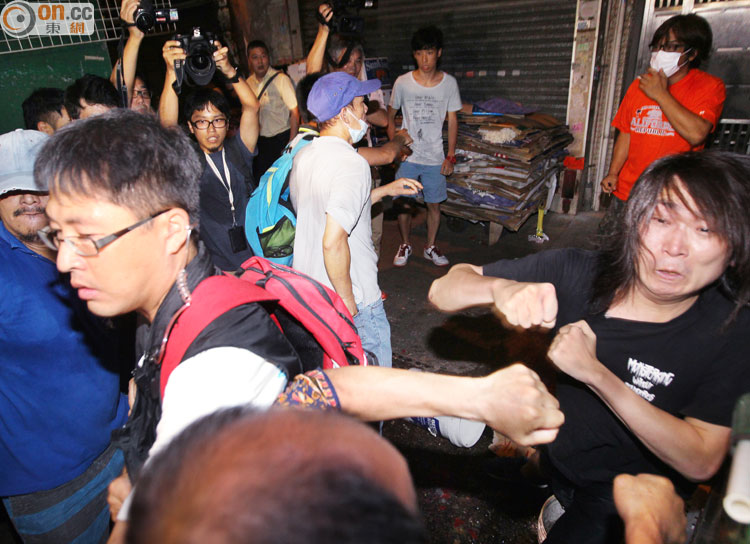
(Oriental
Daily) June 28, 2015 22:33
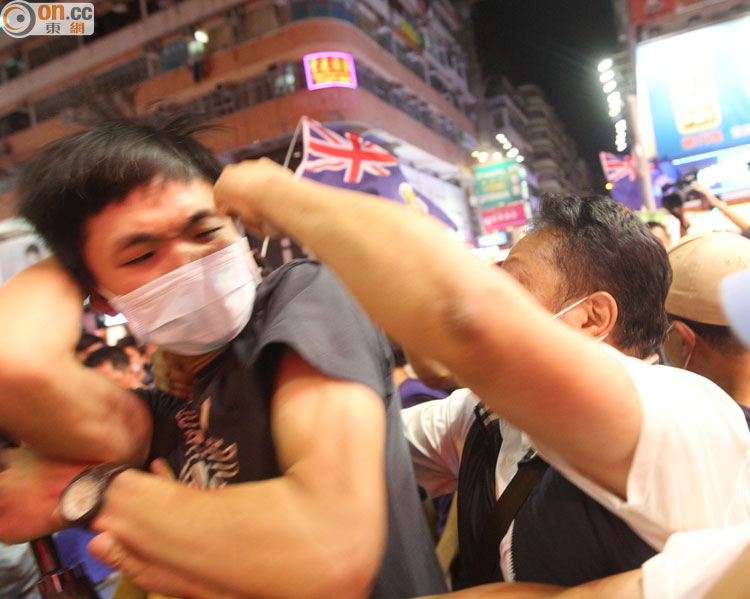
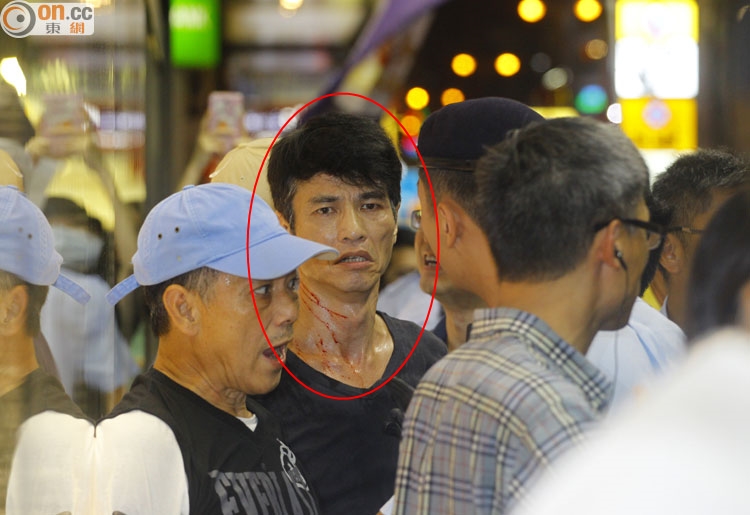
A man was hit by the demonstrators
until he was bleeding in the neck. The demonstrators accused this man of
committing assault and demanded that the police arrest him. The police declined.
So several dozen demonstrators trailed this man all the way to Tai Kok Tsui
until the man asked the police to take him down to the police station. About
thirty or so demonstrators gathered outside the police station.
(Oriental
Daily) June 28, 2015 23:58
The police arrested four men and
one woman and will charge them with assaulting police officers, resisting
arrest, disorderly conduct in public and common assault. More than 30 Localist
demonstrators gathered outside the police station to demand the release of
those arrested.
(Wen
Wei Po) June 29, 2015.
A number of radical groups were
present, including the Hong Kong Indigenous Democratic Front, the Hong Kong
Localism Power, Valiant Frontier, Local Ideology, Civic Passion, DLLM Orchid,
Hong Kong City-State and so on. However, the participants appeared to be only the foot
soldiers in these organizations and the big bosses were absent. Civic Passion's
number two guy Cheng Chung-tai made an appearance earlier at a forum on Sai Yeung Choi Street
South, but left before the demonstration began. So the participants were dashing
around like "flies with no heads" without any purposeful organization. One of them
said: "The big bosses are in hiding. They said that they are valiant, but they are
actually very scared. They are only using us as cannon fodder."
(Wen
Wei Po) June 29, 2015.
The demonstrators from the Hong
Kong Indigneous Democratic Front, Hong Kong Localism Power, Valiant Frontier and
other organizations showed up in Sai Yeung Choi Street South at around 730pm.
They said that they wanted to demonstrate in a "peaceful, rational and
non-violent" manner. But in truth they want to put a stop to all putonghua
singing there. They also said that non-Local culture must not be introduced into
Hong Kong or else Local culture will be exterminated.
Love Hong Kong Action convener
Anna Chan and Righteous Civil Squadron convener Ah Man came to wave the flags of
the Chinese nation and the Hong Kong SAR region. Anna Chan said that Hong Kong
is a part of the People's Republic of China. If the Localists are dissatisfied,
they can always leave this Special Administrative Region of China and immigrate
somewhere else.
Someone else said that if the Localists forbids anything other than speaking in
Cantonese or English, they should charge into the numerous Korean and Japanese
restaurants on this street because their customers are always greeted in Korean
and Japanese.
The police set up a human wall to
separate the two sides. When Anna Chan and Ah Man left an hour later, there was a
large-scale clash. The combatants fought from Soy Street to Shan Tung Street down Sai
Yeung Choi Street South. A large number of police came and arrested two persons.
But the Localists would not quit.
Captain America with his British flag shouted: "There are too many police here.
Let us go over to the other side and start all over again." So he and those who
followed his call returned to Sai Yeung Choi Street South to provoke the street
performers. They even surrounded an electronics chain store and forced the
employees to lower the gates on the claim that "someone was stealing something."
And someone said that he was
assaulted by somebody. So the battle line was extended to the intersection of
Mong Kok Road and Tong Mei Road. A small number of persons even tried to charge
onto Nathan Road and start another "Occupy". Several dozen persons followed a
police car to the Mong Kok Police Station and demanded that the police release
the arrestees.
(TIME)
Hong Kong Clashes Reveal Anti-Beijing Anger as City Nears Anniversary of
Reunification. June 29, 2015.
Street scuffles between pro-and
anti-Beijing factions broke out in Hong Kong Sunday night local time — and
one of the city’s most prominent pro-democracy figures was set upon in the
street in an apparently unrelated attack. The violence underscores raw
tensions in China’s most open metropolis, just three days ahead of the 18th
anniversary of the city’s return to Chinese sovereignty.
Trouble began when so-called “localist”
groups — many members of which argue for Hong Kong’s independence from China
— staged a rally in the densely crowded Mong Kok district of central Kowloon
to protest the presence of mainland Chinese street musicians. The
performance of Mandarin-language songs in a Cantonese-speaking,
working-class area like Mong Kok is regarded by many localists as culturally
and politically provocative.
Violent clashes broke out when pro-China
groups showed up to counter the localists, with rival groups chasing each
other through streets crowded with shoppers and tourists, forcing retail
outlets to pull down their shutters. Police say five protesters, four men
and one woman, were arrested. No injury figures have been released, but
police used pepper spray to subdue protesters and local media published
photos of at least one bloodied pro-China protester being led from the
scene.
Simon Sin, one of the leaders of Hong Kong
Localism Power, accuses police of not doing enough to protect localist
demonstrators. “The police protected the people who were attacking us. They
didn’t protect us. We got hurt yesterday,” Sin tells TIME.
(EJinsight)
Police slammed over handling of assault on Mong Kok protester. June 30, 2015.
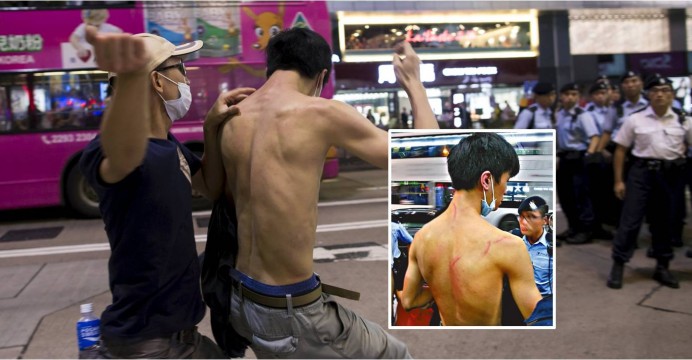
Hong
Kong police are under fire over their handling of an assault by a pro-Beijing
demonstrator on a localist protester during an anti-China rally in Mong Kok on
Sunday night.
A
protester, who gave his name as Sunny, said he saw his friend being attacked
by a group of nine people in the street. The victim, surnamed Leung, was
punched several times and dragged before he managed to escape, Sunny was
quoted as saying by Apple Daily. Camera footage shows a man being pursued by
two people after police separated them. Also, news photos show injuries
to Leung’s back. However, the officers made no arrests in the incident,
angering protesters.
They
were demonstrating against street singing and dancing by a group of women
suspected to be mainlanders. Things began to get out of hand when pro-Beijing
supporters showed up and exchanged taunts with the localists. The heckling
escalated into clashes, with the police moving in, armed with truncheons and
pepper spray.
Apple
Daily is reporting that suspected triads were among a group that instigated
the violence. They were earlier seen with pro-Beijing groups led by I Care
Action. Sources said troublemakers might have been hired to provoke the
localists into a fight, hoping they will be detained and forced to miss a
planned July 1 rally.
[Comment: Bizarre reporting here: "They were
demonstrating against street singing and dancing by a group of women
suspected to be mainlanders." (emphasis added). As far as is known,
"being a mainlander" is not a crime in Hong Kong, in the sense of "suspected
to have stolen the vehicle" or "suspected to have robbed the bank." According
to the
2011 Census, 32.1% of the overall population in Hong Kong was
born in mainland China/Macao/Taiwan. So this statement cannot be made as if
this is normally acceptable. The reporter should find a source to say so and
even find another source to present an opposite point of view. For example,
Mr. X (no first name please) of Y organization said that they were
demonstrating against women suspected to be mainlanders but senior barrister A
says that those women are exercising their freedoms of speech/assembly.]
(SCMP)
Why Hong Kong localism has no future. Alex Lo. June 30, 2015.
Hong Kong has no future unless it can figure
out a way to coexist with the mainland. That is why the radical rejectionism
of so-called localists is a dead end. It's especially tragic that many
localists are young people, whose future might be considerably brightened if
they were willing to explore new opportunities created by the economic rise of
China, and learn mainland culture and language. Alas, disappointed by their
poor local prospects, yet unable or unwilling to look for opportunities
elsewhere, they are stuck in Hong Kong.
And raised by a strong sense of entitlement
and a false feeling of superiority over mainlanders while being basically
ignorant of the outside world, they idealise our city that in reality has no
real moral, intellectual or spiritual substance. In virtually all endeavours
of human value, in the arts and sciences, in cultural tradition and history,
in business daring and artistic creativity, it's to mainland China you need to
turn, not tiny Hong Kong.
We do have our advantages: our freedoms are
real, despite our lack of democracy; and our level of public corruption is
considerably lower than that on the mainland. These are worth preserving and
fighting for. But both freedom and corruptibility are relative. And our fight
to preserve our uniqueness and advantages does not, and should not, equate to
anti-mainland sentiments and actions.
The average mainland urbanite is much freer
and materially better off than any time in the last century and a half. The
Communist Party's anti-corruption drive remains a work in progress. But we
should never underestimate the party's ability to renew itself and adapt to
new circumstances. A richer and freer China will just speed ahead of Hong
Kong.
The oft-cited warning about Hong Kong
becoming "just another Chinese city" betrays our own arrogance and ignorance.
Many leading mainland cities have a depth and human interest our own city
simply cannot match. Like it or not, our future, good or bad, is China. Even
if you idolise the West, remember that most Westerners have no real interest
in Hong Kong by itself except as a passageway or transit point to the
mainland.
Hong Kong either gets on that unstoppable
bandwagon that is China or it will just get left behind.
Videos
(INT News Channel)
https://www.youtube.com/watch?v=4nUguIM29uI Women sing while
demonstrators chant obscenities. Anna Chan shows up at 7:00.
(INT News Channel)
https://www.youtube.com/watch?v=aAK_kOOChJI Fighting at 4:20. An arrest
is made.
(INT News Channel)
https://www.youtube.com/watch?v=bCAHJo5up8Q The police won't arrest the
alleged attacker
(Apple Daily)
http://hk.dv.nextmedia.com/actionnews/hit/20150629/19201886/20073437?_ga=1.242723777.218432039.1397350956
Lots of fighting.
(Ming Pao)
https://www.youtube.com/watch?v=yeF0nBoJo-4 Masked demonstrators
assaulting citizens (e.g. flying kicks at 0:39 and 1:14). This is the video that
the pan-democrats, Benny Tai, Joseph Zen, Jimmy Lai, Martin Lee, the
Professional Teachers Union, the Civil Human Rights Front, the Federation of
Students and Scholarism will claim ignorance about because they made sure that
they never watch it.
- Speaking of videos that must not be viewed, here is the most famous one to my
mind:
https://www.youtube.com/watch?v=8HUPIuuZOTs&feature=youtu.be
(Cable News)
http://cablenews.i-cable.com/webapps/news_video/index.php?news_id=461033
(NOW news)
http://news.now.com/home/local/player?newsId=141230 Demonstrators
attacking citizens.
(SocRED)
https://www.youtube.com/watch?v=n7pqY4Gd8WQ The police escort the Love
Hong Kong Action and Righteous Civil Squadron persons away
(SoCREC)
https://www.youtube.com/watch?v=S2k9gkJ8yvc Police action (arrest,
witness statements)
(SocREC)
https://www.youtube.com/watch?v=vll3Y8U-Ok8 Police carry a man away
while fighting a scrum of photojournalists.
(SocREC)
https://www.youtube.com/watch?v=Wwce4PGn4Tw Following the police closely
at the Mong Kok fruit market
(SocREC)
https://www.youtube.com/watch?v=Q6OH0U6ngeo Mong Kok Fruit Market action
(The Epoch Times)
https://www.youtube.com/watch?v=oEIhoAGY9LY Localists forced the police
to take assault suspect down to the police station
(The Epoch Times)
https://www.youtube.com/watch?v=l9XVq_TPGdk Pushing and shoving,
followed by pepper spray
(The Epoch Times)
https://www.youtube.com/watch?v=DZRVojbO4UM Police escort alleged
attacker to leave
(Passion Times)
https://www.youtube.com/watch?v=AkqWpbE1a1Q Boxing matches broke out.
Internet comments:
- Mr. Ko showed up today to sing.
He said that he was born in Hong Kong and has been living here for more than
fifty years. He says that he has no political inclinations. In the last five years, he and
his friends became interested in singing putongua songs on the Sai Yeung Choi Street
South pedestrian mall. But after tonight he is angry at the Localists for
preventing him from singing.
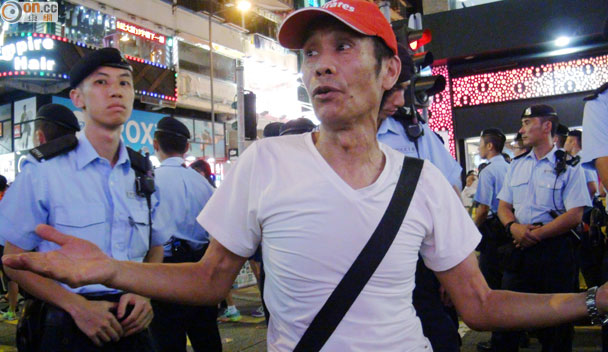
- Recognize this man! He is a Hong Kong traitor. We need to find out everything
about him -- his name, his family, his home address, his telephone number(s),
his workplace, etc. And then we will make him regret that he ever sung songs in
putonghua.
- (Lau
Sai-leung at The Stand News)
The Chinese middle-aged women
entered politics during the anti-North East New Territories Development
protests. After Occupy Central started, they showed up in Tseung Kwun O to stop
Apple Daily from sending out its printed newspapers. During the constitutional
reform period, they showed up to support the government. These Chinese
middle-aged women are a political tool. They are definitely imported from the
mainland and not authentically local. The mainland is operating the Chongqing model
with these women. In Chongqing, Bo Xilai was the first to recognize the political potential of
the plaza middle-aged women, and he promoted Red Songs to use in his drive against
corruption. Bo used a Cultural Revolution approach to consolidate his power.
During that time, Red Songs were even sung at the Hong Kong Town Hall concert
hall. These Chinese middle-aged women are not engaged in the leisure activities
of ignorant womankind. They represent the resurrection of Cultural Revolution
politics. The people of Hong Kong will not tolerate them.
The mainland Chinese middle-aged
women grew up during the Cultural Revolution. They were born between the
mid-1950's and 1966. When they were in primary and secondary school, they
persecuted their teachers in a nationwide effort. Their common dream was to be
inspected on parade at Tiananmen Square by Chairman Mao. They are uneducated and
uncultured, but they understand politics. The people of Hong Kong have seen
through this mass stupidity of the Cultural Revolution. Back then, many people
took the risk of swimming across Dapeng Bay in order to start new lives in Hong Kong.
Those people left the mass stupidity behind and changed the fates of their
children.
It is normal reaction for the
people of Hong Kong to reject the Red plaza dancing of these Chinese middle-aged
women, especially in public spaces. Why are local bands allowed to perform but
these Chinese middle-aged women are not? The people of Hong Kong know the difference --
these middle-aged women sing Red songs and do the Plaza dance, and they are
allied with the digiterati, the triad gangs and the country squires when they
show up en masse.
- I understand how the Localists
have the inalienable right and the sacred duty to beat up any mainlander that
they come across, but the newspaper is reporting that the Localists were chasing
and assaulting "citizens" all the way from the Sai Yeung Choi Street South
pedestrian mall into the Canton Road Fruit Market. Are they "valiant resisting"
and "civilly disobeying" regular citizens now?
- I completely understand why the
demonstrators are forced to protest. The placard held by this Chinese
middle-aged Localist woman reads (in English): "Chinese Style Street Dancing is
Bad Taste."
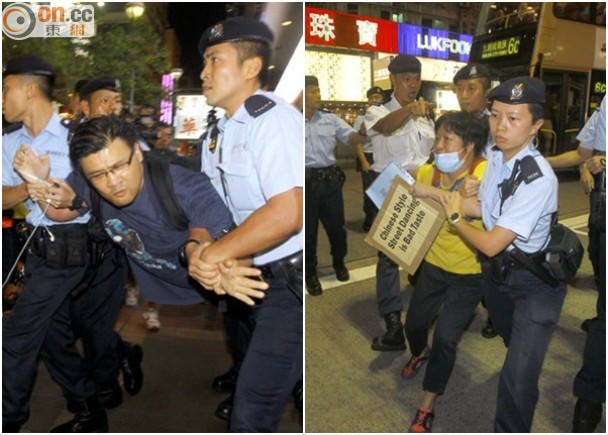
The woman was arrested merely for jumping into the middle of Nathan Road to
block vehicular traffic. The fact that she was dressed in bad taste is not
germane to the core issue here.
- I completely understand this.
This man hit a Localist. Therefore this man is bleeding from a big gash in his
neck. Therefore the police must arrest him or else the Localists will lay siege to the Mong
Kok Police Station.
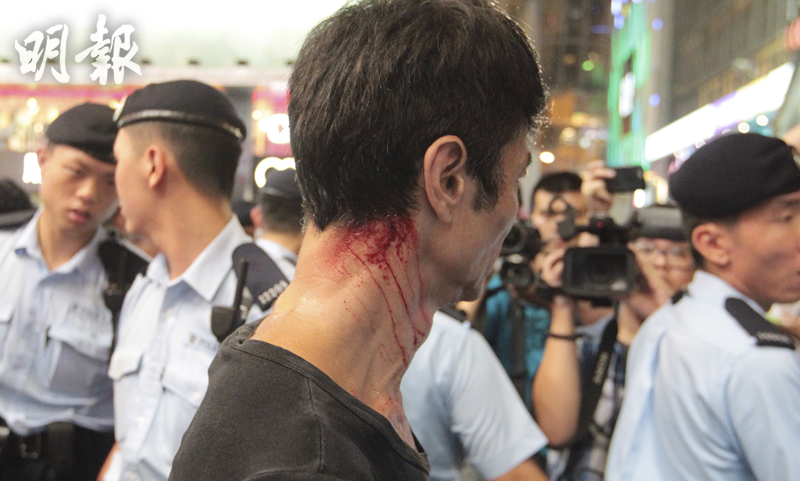
- On television, I heard the
demonstrators yell: "This is Hong Kong. We only speak Cantonese here. No other
language is allowed." I hope this message gets through loud and clear to the
international community (Americans, Europeans, Filipinos, Australians/Kiwis,
Canadians, Indonesians, Taiwanese, Japanese, Koreans, etc) -- YOU ARE NOT WANTED
HERE. IF YOU WANT TO STAY IN HONG KONG, YOU MUST SPEAK ONLY CANTONESE.
- Every evening I pass through the Mong Kok East train station on my way home.
A middle-aged Chinese man is always playing a guitar and singing English-language
soft rock songs (such as As Tears Go By, Five Hundred Miles,
Michelle, Yesterday, etc).
Can the Localists please tell him that this is Hong Kong and no other dialect/language
besides Cantonese is allowed?
- Hong Kong is a cosmopolitan city. Cosmopolitan means: "Free from local,
provincial, or national ideas, prejudices, or attachments; at home all over the
world." That is why all dialects/languages other than Cantonese shall be banned.
- June 28 2015 23:16 discussion
forum comment. "Hong Kong people unite to oust all mainlanders. Support the
Localists!"
- Look at the timeline. The action is still thick out there, and you support the
Localists by pounding on your keyboard. Why don't you get out there and occupy
the Mong Kok Police Station, seize the guns and ammunition and actually
start a revolution?
- In Apple Daily's report (no link
will be provided so that they won't profit from the hits), it was said that the Localists drove the Chinese
middle-aged women away whereupon the Blue Ribbons assaulted
the Localists. That choice of language clearly show that Apple Daily is "fair
and balanced" just like
Fox News.
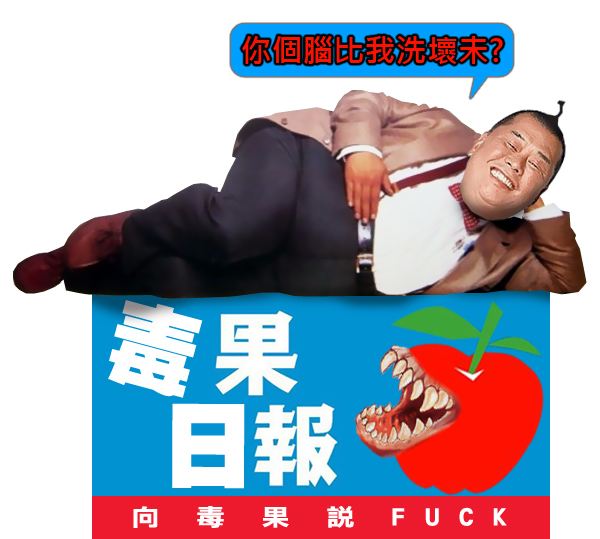
Have you been brainwashed by me yet?
Poisoned Fruit Daily
Say FUCK to the Poisoned Fruit
- Who is a Localist anyway? Here
are some choices:
--- Someone whose ancestors were already in Hong Kong before 1898 and now has
Ting Uk land rights in the New Territories
--- Someone whose parents were both born in Hong Kong
--- Someone who has at least one parent born in Hong Kong
--- Someone whose parents are Hong Kong permanent residents (but not necessarily
born here)
--- Someone who has at least one parent who is a Hong Kong permanent resident
(but not necessarily born here)
--- Someone who was born in a Hong Kong hospital (but his parents need not be
Hong Kong permanent residents)
--- Someone who was born in Hong Kong but not in a hospital (but his parents
need not be Hong Kong permanent residents)
--- Someone who was not born in Hong Kong but has become a Hong Kong permanent
resident after living here for seven years or more
--- Someone who is here on a one-way visa but has stayed here for seven years in
order to become a Hong Kong permanent resident
--- Someone who agrees with everything that Mr. Ho (no first name, please)
of the Hong Kong Localism Power says.
If you come up with some rules, you will find it interesting that many of the
loudest Localists aren't so Local after all (to wit, Claudia Mo Man-ching, Lee
Cheuk-yan, Wong Yeung-tat, Billy Chiu, Cheng Kam-mun, Nathan Law, etc).
- What are they REALLY
protesting about?
It can't be because those
singers/dancers make too much noise. On Sunday evening, the whole Sai Yeung Choi
Street South is filled with performance artists.
It can't be because those people
from a trash culture are playing trash music in putonghua:
It can't be because those people
have bad taste.
It can't be because those people
were taking tips (see
https://www.youtube.com/watch?v=oG3eS__sfgg ).
It can't be because those people
are taking over public space. Here is the lobby of the HSBC building filled with
Filipina maids on a Sunday. The Localists have never complained.
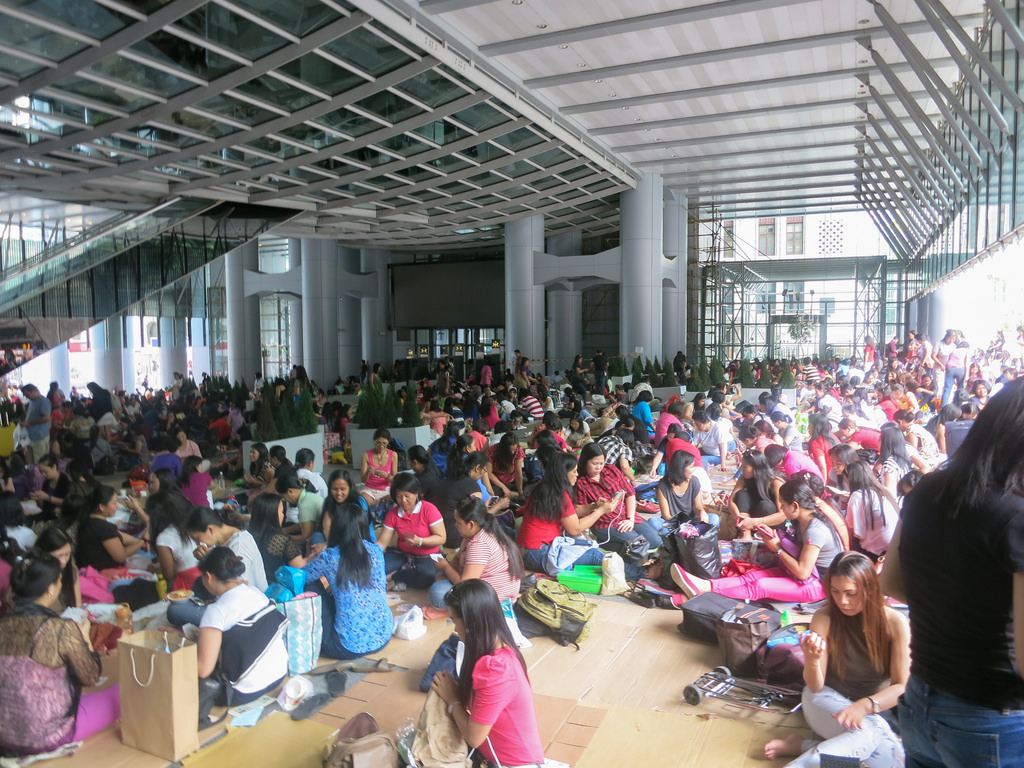
In front of Chungking Mansions in
Tsim Sha Tsui, there are always dozens of South Asians waving business cards in
front of pedestrians. The Localists have never complained.
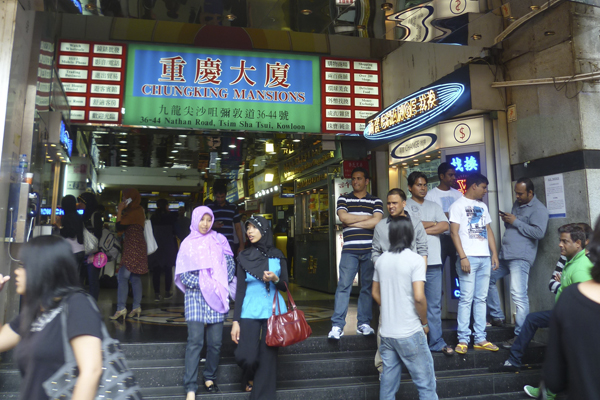
For here is a large Sai Yeung Choi
Street South crowd listening to a local band singing in English. The large crowd
is impeding the progress from others who want to pass through. No complaints
from the Localists
either.
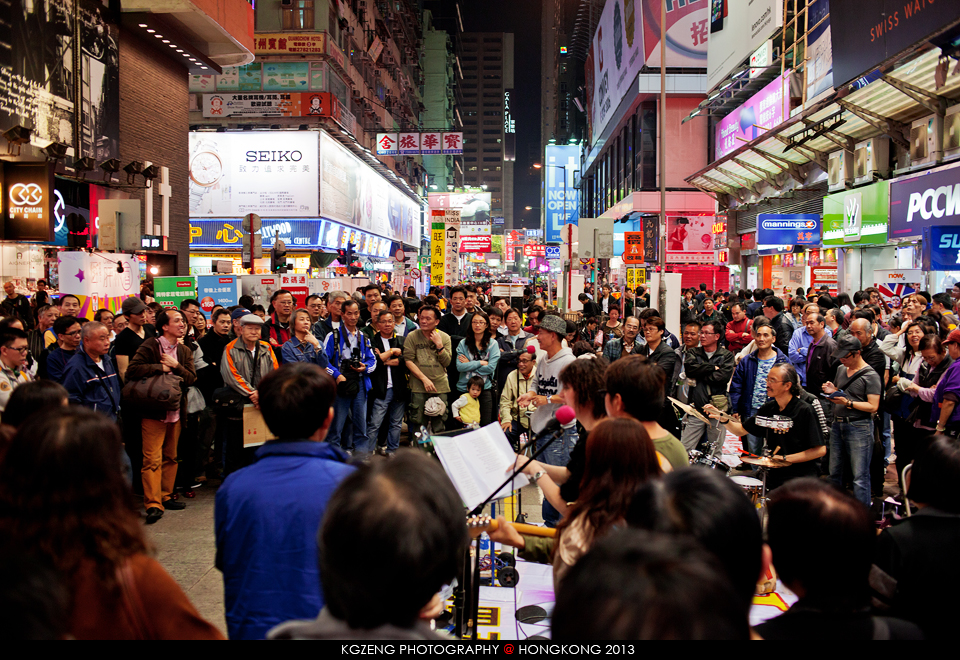
Are you puzzled? The real reason is given in Hong
Kong Localism Power's call for action: "When Hong Kong Localism Power was
holding its forum on Sai Yeung Street South pedestrian street last week, the Mong Kok
Middle-aged Women Group increased their volume and overwhelmed our discussion.
Therefore, we are starting an anti-locust movement to express our
dissatisfaction with the Middle-aged Women Group!"
Get it!? This is just another
gangland turf struggle. All other assertions are
chaff counter-measures to misinform, mislead and misdirect.
- Here is a video that summarizes
some of the points of the debate:
https://www.youtube.com/watch?v=ej62c6_E3RE
Intro: Video of the middle-aged
Chinese women in Mong Kok.
Con: For example, the songs that
they sing, the dances that they dance, they're all very Chinese in style and
peasant-like. Such Chinese culture are unsuitable for a cosmopolis.
Pro: You cannot choose, filter or
eliminate on the basis of cultural tastes. There are many forms of pop culture.
If I think that the music that I listen to is at a higher level than other
people ... well, this is not reasonable.
Is this because there is
insufficient public space? or inappropriate usage?
Con: Public space should be used
only by local people. I find that these middle-aged women are basically not
local people. They came here to make money. Public space is not intended for us
to make money from.
Pro: When you think that they
don't perform well, you tell them to stop. I think that is somewhat
unreasonable, because everybody has the right to use public space. We should be
using it on the basis of mutual respect. The government manages the public
space. People of our generation do not have a consensus about the use of public
space. I think that it is time to discuss a three-win solution.
- If people seem to be confused
about what is allowed and what is not allowed on the Sai Yeung Choi Street South
pedestrian area, then it is urgent now to form a Localist committee so that they
can decide for us. All those who want to perform on the street must pay a small
fee for a limited-time stamp of approval. You have a nice leg, and you wouldn't
want it broken, do you?
- Video: Monty Python skit of mafia blackmailing the British army
https://www.youtube.com/watch?v=cNZKUozrBl4
- This is a huge racket, because Localist committees will also be needed to
decide on many other things:
--- Events held at the Hong Kong Town Hall/Hong Kong Cultural Centre
--- Movies exhibited at the Hong Kong International Film Festival
--- Books sold at Joint Publishing/Commercial Press/Chung Hwa bookstores
--- Stores rented out in all shopping malls
--- Advertisements/programs on radio/television
--- Academic appointments at the eight universities in Hong Kong
--- Hiring at all companies listed on the Hong Kong stock exchange
...
- Why is so big deal about these
street fights? Here is something that just happened the day before when several dozen South Asian
refugees fought in Yuen Long:
https://www.youtube.com/watch?v=eBqioXwhREs. And these are the people
who are causing chaos in Hong Kong, not the Chinese female middle-aged
singers/dancers. Why don't the Localists do something about the South Asian
refugees?
- Chronicle of a court trial
outcome foretold
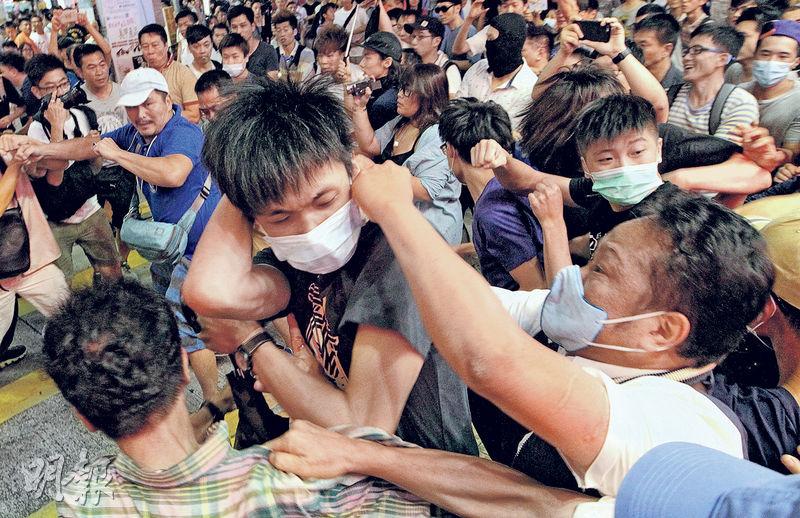
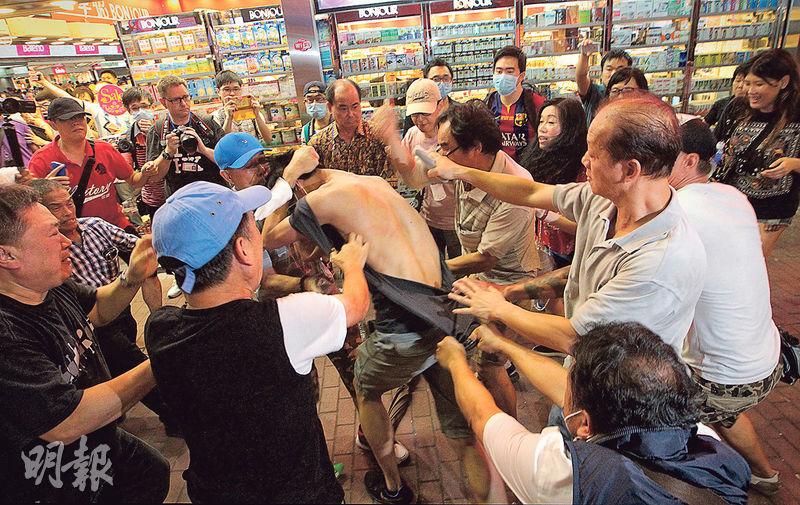
Defendant:
"I was getting a headache at home. So I left my Lei Muk Shue home and went down
to Mong Kok to buy an aspirin. I walked by the said location and the police
arrested me without cause."
Magistrate: $300 fine or 120 days of community
service or unconditional release.
- By stopping the Chinese
middle-aged women from singing and dancing in a public area, the Localists have
violated the following articles of the
Basic Law:
Article
27
Hong Kong residents shall have freedom of speech, of the press and of
publication; freedom of association, of assembly, of procession and of
demonstration; and the right and freedom to form and join trade unions, and to
strike.
[The subjects were not allowed to express themselves through singing/dancing;
not allowed to assemble in a public area]
Article 28
The freedom of the person of Hong Kong residents shall be inviolable.
No Hong Kong resident shall be subjected to arbitrary or unlawful arrest,
detention or imprisonment. Arbitrary or unlawful search of the body of any
resident or deprivation or restriction of the freedom of the person shall be
prohibited. Torture of any resident or arbitrary or unlawful deprivation of the
life of any resident shall be prohibited.
[The subjects were subjected to deprivation or restriction of the freedom of
person.]
Article 31
Hong Kong residents shall have freedom of movement within the Hong Kong
Special Administrative Region and freedom of emigration to other countries and
regions. They shall have freedom to travel and to enter or leave the Region.
Unless restrained by law, holders of valid travel documents shall be free to
leave the Region without special authorization.
[The subjects were not allowed to move around at will.]
Article 34
Hong Kong residents shall have freedom to engage in academic research,
literary and artistic creation, and other cultural activities.
[The subjects were not allowed to engage in artistic creation (singing and
dancing) and were in fact told that their activities are 'trash'.]
If you ask the senior barristers
of the Civic Party/Democratic Party to comment on this state of things, they
will surely respond: "I don't have enough information on these events. I'll get
back to you later if and when I find out more." Since they won't try to
find out more, they won't ever have to comment.
- (Hong
Kong Equal Opportunities Commission) Race Discrimination Ordinance
The RDO is an anti-discrimination
law enacted in July 2008 to protect people against discrimination, harassment
and vilification on the ground of their race. Under the RDO, it is unlawful to
discriminate, harass or vilify a person on the ground of his/her race. The RDO
has come into operation since 10 July 2009.
According to RDO, race in relation
to a person means the race, colour, descent, national or ethnic origin of the
person. Racial group means a group of persons identified by reference to race,
colour, descent, national or ethnic origin. References to a person’s racial
group refer to any racial group into which the person falls.
If a person engages in an
unwelcome, abusive, insulting or offensive behavior because of another person’s
or his/her near relative’s race, which makes him feel threatened, humiliated or
embarrassed then it is racial harassment. Racial harassment can be in any
form—physical, visual, verbal or non-verbal—and even a single incident may
constitute racial harassment. It also occurs if a person creates a racially
hostile environment for another person because of his/her or his/her near
relative’s race. Racial harassment is unlawful under the law. Example: Engaging
in name calling, which people of certain racial groups may find offensive or
impolite, or using a disparaging or offensive tone when communicating with
people on the ground of their race could be racial harassment.
Racial harassment is an activity
in public which incites hatred, serious contempt for, or severe ridicule of a
person because of his/her race. Any racist incitement involving threat of
physical harm to persons or their property or premises is considered serious
vilification and is liable for fine to a maximum of $100,000 and imprisonment
for a maximum of two years
- Twitter photo of the Chinese
female middle-aged street singers/dancers:
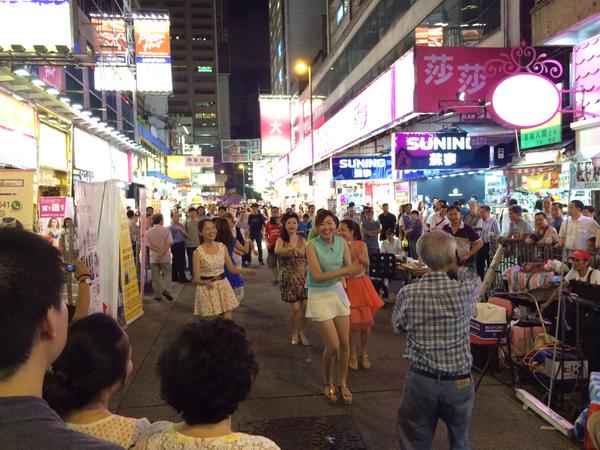
- Twitter photo of protest message against Chinese female middle-aged street
singers/dancers: Trash songs, trash music, go back to the mainland!
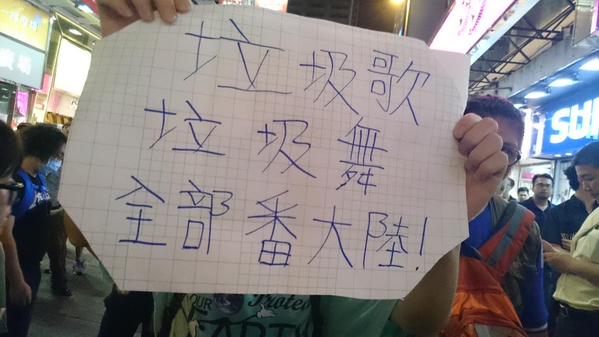
- Twitter photo of protest against Chinese female middle-aged street
singers/dancers: Chinese bitches!
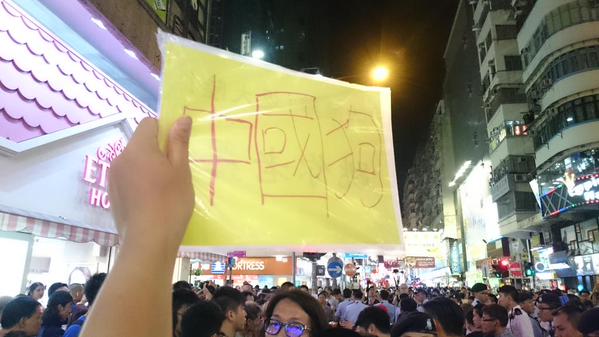
- Twitter photo of protest against Chinese female middle-aged street
singers/dancers: Chinese Style Street Dancing is Nuisance. Chinese old ugly
prostitutes. (P.S. Michael Tanner must
be irritated at the Union Jack flags)
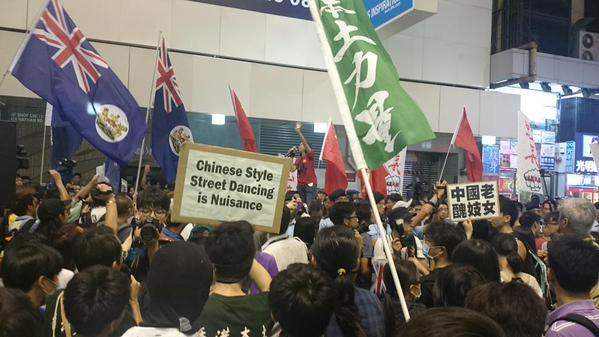
- A new word is introduced into the English language:
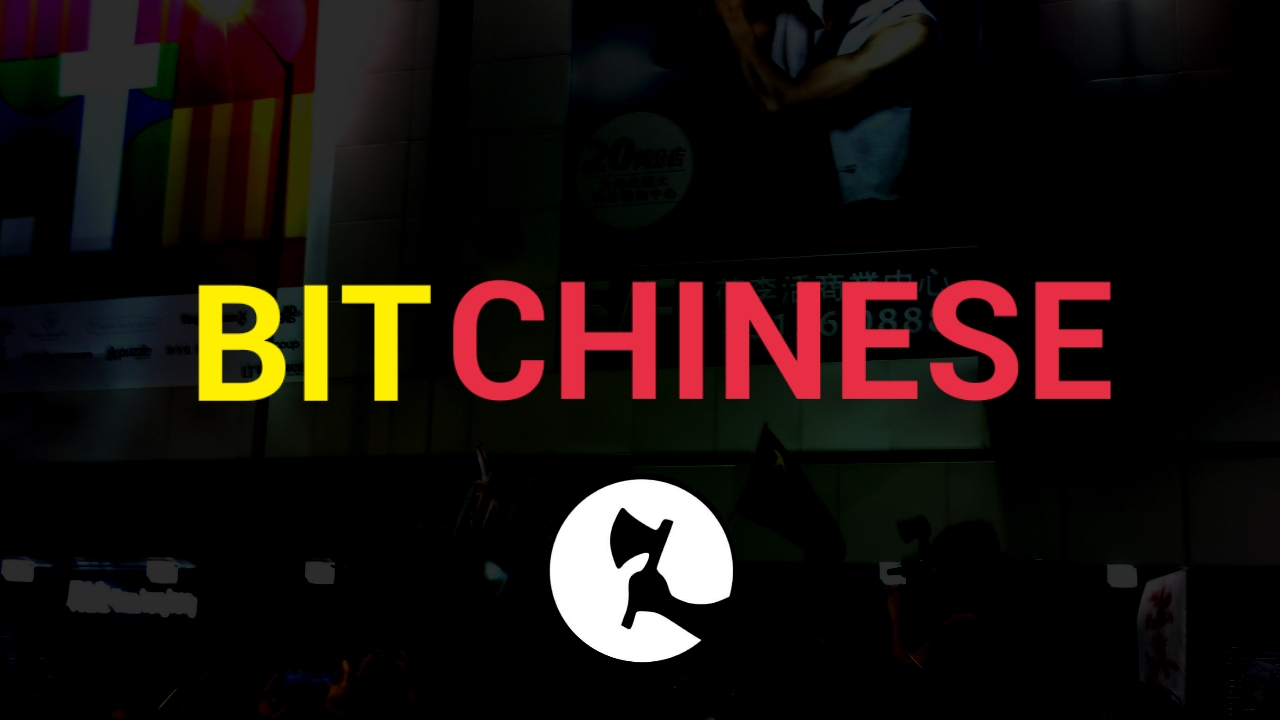
- (Oriental
Daily) Global thinker/leader Joshua Wong was was suffering from a severe
case of attention deficiency on this night until 12:30am when he and his
girlfriend Tiffany Chin were assaulted by a man and a woman near a McDonald's on
Ivy Street, Tai Kok Tsui district. The man grabbed Wong by the neck and punched
his face. Chin picked up the camera and tried to film, but the man pushed her
down and dragged her on the ground by her hair. He tried to kick Wong again. The
man and the woman then fled. Wong called the police who took him down to Kwong
Wah Hospital for an examination.
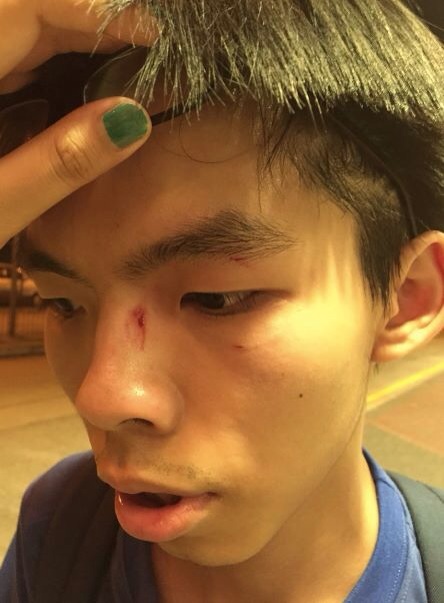
- "As quiet as a mouse" - that's Joshua Wong if you ask him whether he supports
assaulting Chinese middle-aged female singers/dancers in the pedestrian area.
- When he doesn't need the police, he calls them "police dogs." When he needs
the police, he calls them "police uncles."
- While Wong was getting punched in the face, Chin did not immediately try to
stop the man or call the
police. Instead she took out her phone to start filming. Terrific sense of
priority here.
- How many "Likes" did Chin get for her Facebook video post?
- When Joshua Wong was arrested in Mong Kok previously, he claimed that the police squeezed
his scrotum really hard. That is why he is reluctant to deal with them again.
- On July 1st, we need to march and demonstrate against the organized violence
directed against our students. P.S. Don't forget to donate lots of money.
- This is yet another CIA false flag operation. The goal is to boost attendance
and donations at the July 1st march.
- This was just so predictable. They've already tossed petrol bombs at Apple
Daily and Jimmy Lai's home, hired a hit man to kill Jimmy Lai with some bullets but no
gun, tossed pig entrails at Jimmy Lai, etc. There aren't too many unplayed
variations left.
- Joshua Wong asked the attacker: "Why?" The man replied: "I don't need any
excuse to beat you up." Here is the big problem. Wong should not be asking the
man that question. He should be asking: "What did I do to get assaulted?" That's
where the solution lies.
- You write: "Hong Kong has become an awful place, in which people with
different political opinions are violently attacked." I completely agree with
you. Yes, it was really awful that the Chinese female middle-aged singers/dancers
were violently attacked today.
- Derivative art or violent threat?
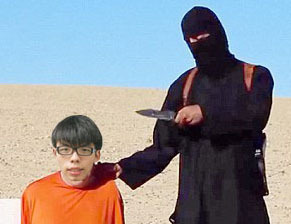
- Derivative art - A spoof of
plaza dancing in the style of Wong Kar-wai's The Grandmaster.
https://www.youtube.com/watch?v=HFAxMKVkId0
- "One
Country Two Systems" was introduced in order to make sure that Hong Kong
can retain its established system with a high degree of autonomy for at least 50
years after the 1997 handover. On one hand, some people don't want to see it
become One County One System. Thus the Localists don't want to see mainland
culture such as plaza dancing creep into Hong Kong. On the other hand, some
people want to see it become One Country One System. Thus the Localists want to
see popular culture such as plaza dancing be banned in Hong Kong just like on
the mainland (see
The Wall
Street Journal: Will China Ban the Dancing Grannies?).
- Variation on a saying of
Sigmund Freud: The great question that has never been answered, and
which I have not yet been able to answer, despite my thirty years of research
into the Localist's soul, is 'What does a Localist want?'
- (HKG
Pao) Recently the government proposed to rebuild the Sai Lau Kok Garden
in Tsuen Wan. However, People Power legislator Chan Wai-yip said that the
rebuilt site would become a plaza for middle-aged women to sing/dance.
By this logic, we should not build any highways because the Yellow Ribbons will
occupy it, and we should not designate any pedestrian malls because the Shopping
Revolutionaries will take over? There are hundreds of
thousands of "middle-aged women of Chinese descent" in Hong Kong and they have
their right to use public space as they see fit (including singing and dancing
together). Also, it was pointed out that Chan Wai-yip's wife fits the
characterization of "Chinese middle-aged woman."
Hong Kong Localism Power Facebook
June 21, 2015.
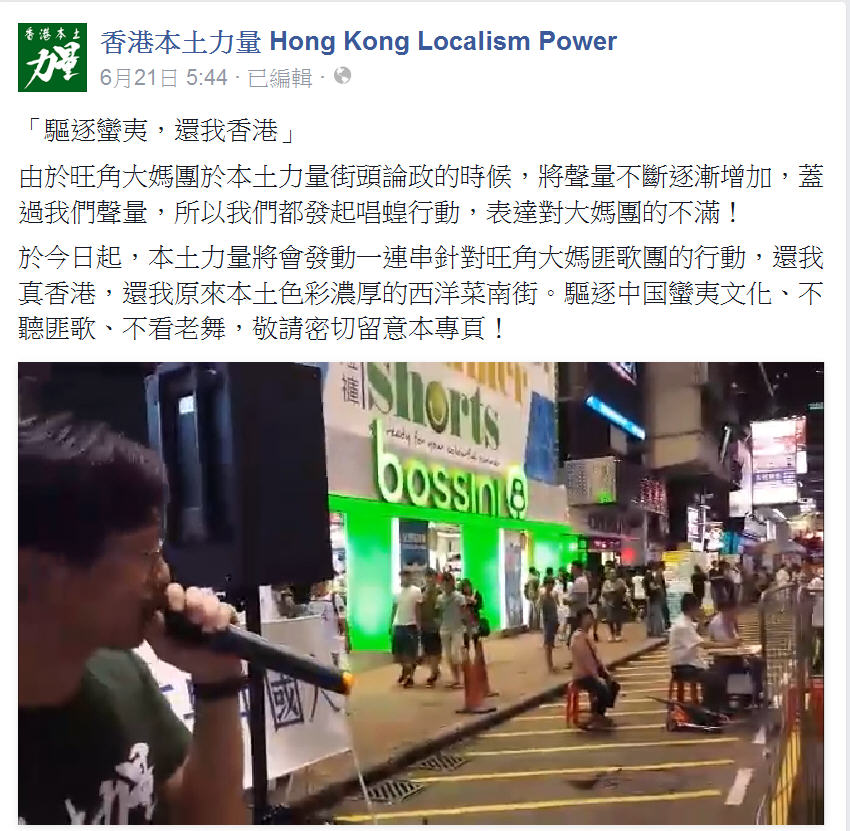
"Chase away the barbarians, give
us back our Hong Kong"
When Hong Kong Localism Power was
holding its forum on Sai Yeung Street South pedestrian street, the Mong Kok
Middle-aged Women Group increased their volume and overwhelmed our discussion.
Therefore, we are starting an anti-locust movement to express our
dissatisfaction with the Middle-aged Women Group!
As of today, Hong Kong Localism
Power will undertake a series of actions against the Mong Kong Middle-aged
Bandit Women Singing Group in order to restore our genuine Hong Kong, to restore
our Sai Yeung Choi Street South with its original thick local flavor. We will
purge all Chinese barbarian culture, we will refuse to listen to bandit music,
we will refuse to watch these old ladies dance. Please pay attention to our
page!
Wan Chin's Facebook

The Localists have their own
character in beating back the Middle-Aged Dancing Group. Raise a placard that
says: "Ugly women doing old dances (homonym for "fuck the mother"), mainlanders
appalud." Just walk over there and display it silently. Then you say that you a
mainlander and enjoy seeing equality because everybody can become a dancer. If
they disagree that they are ugly, you say: "I only said that ugly women can
dance. Dancing is a human right. You are so pretty, so you should keep on
dancing."
Internet comments:
- It is astonishing that the fake
localists would switch from valiant discussions about throwing petrol bombs to
opposing female middle-aged street singers/dancers in less than one month.
- DLLM! The fucking Yellow Ribbons
occupied Sai Yeung Choi Street South for almost 80 days. During that time, they
were using megaphones to deliver speeches from morning through the night. The
local residents couldn't get any sleep and started to throw stuff out of their
windows down onto the street. I didn't see Hong Kong Localism Power coming out
to valiantly protect the rights of those local residents.
- The last time I went to Sai
Yeung Choi Street South, I saw the Hong Kong Localism Power booth. It was
Sunday afternoon. There were all two of them. One of them manned the booth while
the other spoke on the megaphone. The man on the megaphone was very worked up in
describing their awesome achievements in the anti-parallel trader demonstrators.
I stood and watched for about five minutes. Nobody else stopped at all. The man
was just screaming into thin air.
-
https://www.youtube.com/watch?v=ny8E9AqqdIY Video of Mr. Bean trying to
do the plaza dance.
-
https://www.youtube.com/watch?v=EdtVIHQEJZs Video of Chinese national
plaza dancing championships
-
https://www.facebook.com/498203090239831/posts/864265626981691 Video of
the Mong Kok plaza dancing that Hong Kong Localism Power is going to put a stop
to by beating the dancers up.
- (Southern
Metropolis Daily) May 15, 2015. At a time when mainland residents are
become less enthusiastic about plaza dancing, Hong Kong is quietly seeing a
burst of plaza dancing in its parks, recreational areas and plazas. While the
theme song for plaza dancing it <Little
Apple>, in Hong Kong the preferred song is <Can't
afford to get hurt>. On an early summer morning, a dozen or so
middle-aged women began dancing in the Mong Kok Road recreational area. They
lined up in three rows, they kicked their legs and waved their hands. Their
motions are simple. They repeated the same song again and again. They stopped at
1030am. They told our reporter that they lived in the neighborhood. They don't
know each other too well, but they get together just for the dancing. "We are
bored. Dancing gives us the change to exercise our body. At 7pm, some people
also come here to dance before heading home for dinner."
Chinese University of Hong Kong
anthropologist Wang Qianni said, "In a globalized world, women everywhere seemed
to pursue the same thing. In developed countries such as England, senior
citizens like to do modern sequence dancing and the English people respect their
actions. In China, plaza dancing becomes the butt of jokes. Maybe this tells us
that we should re-think tolerance in modern Chinese society." She also said:
"Maybe it is not a question of middle-aged women's plaza dancing intruding into
private space, but rather the issue is whether private space is intruding upon
the public space of senior citizens. Urban designers should think about the
demand of space as reflected in plaza dancing, as well as come up with ideas
about how to consider the needs of women and senior citizens."
- The Great Proletarian Cultural
Revolution: Event Announcement
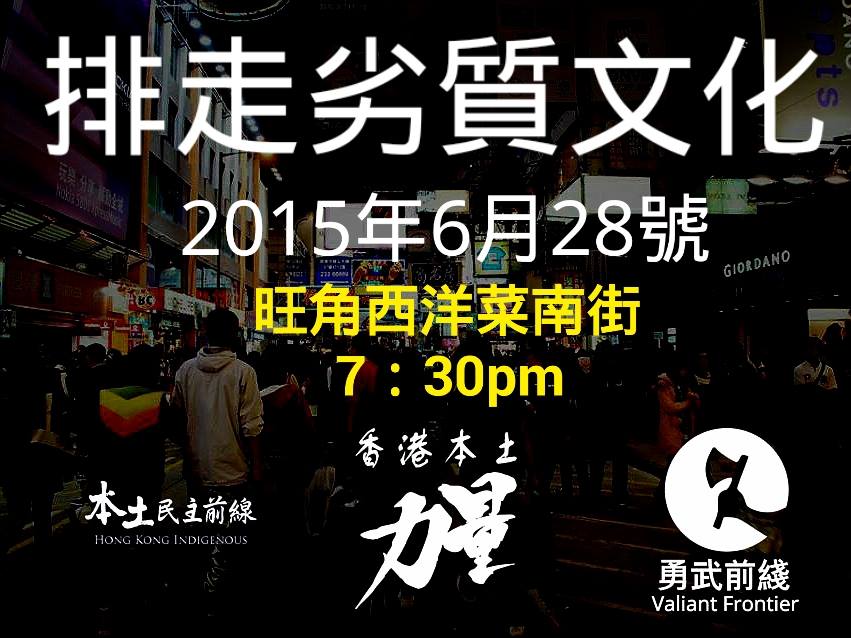
Eradicate poor-quality culture
2015 June 28
Sai Yeung Choi Street South, Mong Kok
7:30pm
Hong Kong Indigeneous/Hong Kong Localism Power/Valiant Frontier
- Looks like the Hong Kong City-State valiant warriors are going out there
to beat up some middle-aged women! That's called 'picking on someone of your own
size'.
- If love means never having to say that you're sorry, then democracy means
never saying that someone else's culture is inferior and must be eradicated.
(SCMP)
Last remaining tents cleared from Hong Kong’s Occupy spillover camp outside
Legco. June 24, 2015.
The last remaining pro-democracy
protesters’ tents in front of Hong Kong’s Legislative Council building were
cleared this morning. Representatives from the Lands Department read an
ultimatum, saying that anything left in the public areas in front of Legco
could be removed, and that the government reserved the right to prosecute
what it calls “illegal occupiers.”
The clearance went smoothly, except for one
Putonghua-speaking, middle-aged man who seemed reluctant to leave. After
talking to reporters and representatives from the Lands Department, he was
taken away by two police officers to an unmarked white van, which left the
area.
Ellen Leung, a protester aged in her 30s,
said she had been here intermittently since last year during the Occupy
protests. The freelance marketing worker said that for the past few days,
protesters had been gathering their remaining supplies, such as blankets,
and getting them cleaned before donating them to charity. She said she was
sad when the government cleared the Occupy camps last December after 79 days
of protests, but this time she feels different because the government’s
political reform proposal was voted down by Legco last week. “As least we
achieved something when the political reform package didn’t pass,” Leung
says. “Now we’ll continue our protests in the upcoming [District Council]
elections.”
Video:
(dbc)
https://www.youtube.com/watch?v=fdMY0BM9aLI
Internet comments:
- Who is this "Putonghua-speaking,
middle-aged man who seemed reluctant to leave"?
(Oriental
Daily) The mainlander Wang Deng-yao who has overstayed his visit visa
argued for a while before he was finally taken away by the police.
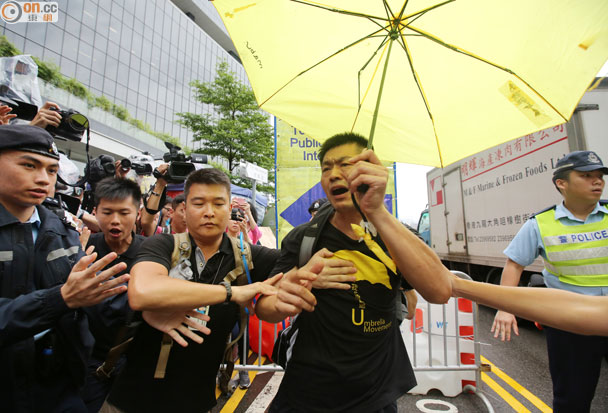
- When 12-year-old mainlander Siu Yau-wai was reported to have overstayed, the
Valiant Front called for valiant demonstrations to have him deported immediately
(see #247). Let's see whether the
Valiant Front will hold valiant demonstrators to have Wang Deng-yao deported
immediately. Helpful advice: Don't hold your breath.
- Ah, I remember Wang Deng-yao
(see
#218). The Oriental Daily photo does not show the state of his teeth. I
wonder how many are left after today?
- (TVB)
Wang Deng-yao argues with a Lands Department worker, who said: "This stuff now
belongs to the government. This no longer belongs to you. Do you understand?"
Wang Deng-yao argued back: "I am facing the prospect of becoming a street
beggar. What can I do? What have I done wrong? What is wrong? Tell me. Don't
take any action."
This is the end of the conversation. Before this video, Wang Deng-yao demanded more time
to pack up.
The worker reminded him that three days' notice had been given. Wang said: "I am
especially dissatisfied because this government is treating me in an inhumane
manner ... "
- Question: Is panhandling
criminalized in Hong Kong?
Answer: Who cares about any law? All I know is that there are beggars everywhere
(in Mong Kok, Causeway Bay, etc).
- But if you really want to know, here is:
CA 228 Section 26A Punishment of persons begging alms:
Any person who wanders abroad, or
places himself or herself in any public place, street or waterway to beg
or gather alms, or causes or procures or encourages any child or
children so to do, commits an offence and is liable on conviction-
(a) for a first or second
offence, to a fine of $500 and to imprisonment for 1 month; and
(b) for a third or subsequent offence, to a fine of $500 and to
imprisonment for 12 months.
- Some other prior arrests for
Wang Deng-yao:
(SCMP)
December 12, 2014. A Beijing resident shouted "Down with the Communist Party!"
before he was carried away. Wang Deng-yao, 55, said he had also taken part in the
1989 Tiananmen Square student movement, and had entered the city this week to
"find out the real situation in Hong Kong".
(CUHK)
December 15, 2014. Wang Deng-yao and other arrested protesters in Causeway Bay
have been released. His visa is due to expire today, so police has asked him to leave
tonight.
Take care, good luck and thank you, Mr Wang.
(EJinsight)
April 28, 2015.
The arrests came after
nearly 100 people staged a demonstration, blocking three south-bound traffic
lanes on Nathan Road outside the Sino Centre, Apple Daily reported. Among
the arrested was Wang
Deng-yao, who is said to have taken part in pro-democracy demonstrations in
Beijing’s Tiananmen Square 25 years ago.
So why hasn't he been convicted/deported?
- Wang Deng-yao has probably procured a Civic Party senior barrister to file a
petition for political asylum and now can stay on while his petition is being
considered.
- Not quite because the case
is bizarre. Wang Deng-yao said that he lost his mainland ID and his
application for a replacement has not been approved. He has applied for political
asylum to the United Nations High Commissioner for Refugee but was turned down.
His only choice now is to go to Thailand, but he does not own any valid travel
document. Therefore, he is stuck in Hong Kong.
He can't find work because anyone who hires him is guilty of hiring an illegal
worker.
- (Oriental
Daily) Benny Mok was at the scene holding a banner and a yellow
umbrella. He said that he has stayed for 250 days and he will miss the place. He
said that it was unjust to clear the site, because the demonstrators have the
right to demonstrate at the East Wing of Government Headquarters. Mok said that
Tim Mei Village represents civil society in this new era and that this
suppression will not succeed. As to being accused of blocking the street, Mok
said that the demonstrators were not allowed neither to enter Civic Plaza to
express their demands nor stay overnight at the Legislative Council
demonstration area. Therefore, they should be allowed the trivial right to sleep
in the street. He said that he will be back, although he won't be staying over.
- (EJinsight)
November 12, 2014.
Former government surveyor Benny Mok has decided to end his hunger
strike, after spending 40 days outside the government headquarters,
Apple Daily reported Wednesday. The 51-year-old “Mr. Hungry” said he
would not hesitate to go on another hunger strike, if the government
makes defamatory remarks on the student protesters or clears out the
protest sites by force. “I could also try preparing food for those who
are staying at the protest sites,” he said. Mok, who is suffering from
diabetes, said he has lost 30 pounds over the last 40 days as he only
relied on saline solution for nourishment. However, his conditions have
improved.
- Here is a photo of Benny Mok eating
rice soup on day 20 (=480 hours)
of his 40-day (=960 hours) hunger strike:
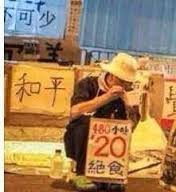
- (TVB)
Demonstrator Mr. Yuan said: "I'm going to miss this place and the relationships
that I have formed with the people here. I am going to sit here to watch them
remove their stuff. I worry whether they have left valuables behind. Some people
did not come back to pick up their valuables. We are leaving. Naturally, next
month, someone else is coming back to build a camp again."
- This Mr. Yuan is incoherent. He
has no idea what he is saying.
- Some people did not come back to
pick up their valuables? This means that their tents were not occupied. So this
was a tent city where no one is staying at?
-
I'll be
back.
- (Oriental
Daily) Photos of things that will be thrown away by the Lands Department
workers. The owners are probably going to obtain Legal Aid and file some
frivolous lawsuits against the government.
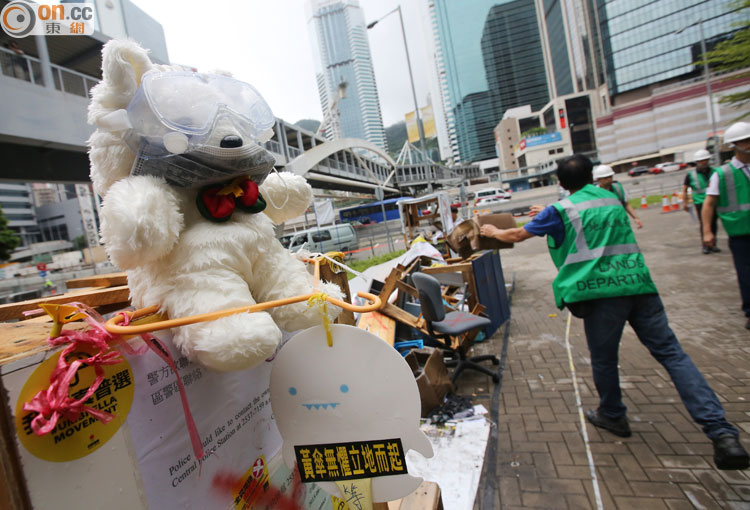
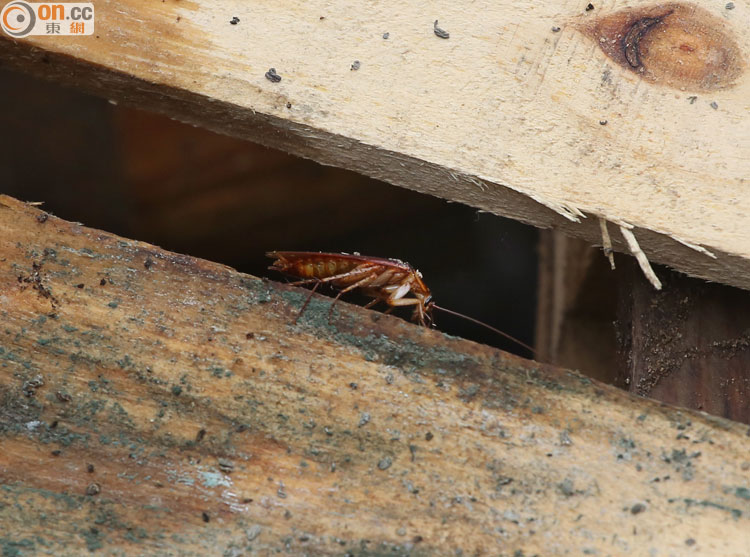
Q1. Are you disappointed that the
universal suffrage proposal was vetoed?
52%: Yes
38%: No
6%: Hard to say
4%: No opinion
Q2. Do you think that the veto of
the universal suffrage proposal has an impact on the prospects of democratic
development in Hong Kong?
27%: Yes, for the better
46%: Yes, for the worse
15%: No change
10%: Hard to say
2%: No opinion
Q3. Do you think that the veto of
the universal suffrage proposal has an impact on governance in Hong Kong?
19%: Yes, for the better
48%: Yes, for the worse
14%: No change
10%: Hard to say
9%: No opinion
Q4. Do you think that the veto of
the universal suffrage proposal has an impact on the relationship between the
central government and Hong Kong?
10%: Yes, for the better
52%: Yes, for the worse
23%: No change
14%: Hard to say
1%: No opinion
Q5. In the long term, do you the
veto of the universal suffrage proposal is a good or bad thing for Hong Kong?
29%: Good thing
63%: Bad thing
5%: Hard to say
3%: No opinion
Q6. Who do you think is the
biggest loser when the universal suffrage proposal was vetoed?
9%: Central government
17%: Pan-democrats
50%: The people of Hong Kong
12%: The Hong Kong SAR government
6%: The pro-establishment camp
1%: Others
1%: No losers
6%: Hard to say
1%: No opinion
Q7. Who do you think bears the
most responsibility for the veto of the universal suffrage proposal?
15%: Central government
56%: Pan-democrats
3%: The people of Hong Kong
14%: The Hong Kong SAR government
5%: The pro-establishment camp
1%: Others
4%: Hard to say
2%: No opinion
Q8. Do you think the Hong Kong SAR
government should focus on the constitutional reform or economic/livelihood
issues in the remaining time of its term?
15%: Constitutional reform
74%: Economic/livelihood issues
4%: Other issues
2%: Hard to say
5%: No opinion
Q9. Some people are advocating to
repay the pan-democrats for their veto of the universal suffrage proposal by
voting against them in the upcoming elections?
62%: Agree
19%: Disagree
12%: Hard to say
7%: No opinion
(Ming Pao via
ltaaa.com)
Every year, the eight universities
in Hong Kong actively recruit top mainland students. This year, they are less
attractive than before. According to Hong Kong Polytechnic University, they had
3500 applicants last year but only 2300 this year for a drop of 34%. Lingnan
University reports that they had 928 applicants last year, but only 556 this
year for a drop of 40%.
According to Joshua Mok at the
Hong Kong Institute of Education, the drop in mainland applicants may be
attributed to parents getting concerned about the safety of their children over
those anti-mainland visitor actions. Also, the Hong Kong dollar is relatively
strong against the Japanese Yen and the Euro, which makes other places in the
world more attractive.
According to the Department of
Education, thee were 6630 mainland undergraduates during the 2014/2015 academic
year. They account for 71% of all non-local students. There were 71,500 local
students. In graduate school, 69% of the student come from the mainland.
Joshua Mok said that every school
wants to have more non-local students in order to create a diversified
environment. Schools also value research ability. However, few local students
want to enter graduate programs. Those who do prefer overseas institutes because
of the foreign experience. Therefore, the schools end up with a majority of
mainland graduate students.
Occupy Central founder and Chinese
University of Hong Kong Department of Sociology associate professor Chan Kin-man
said that if mainland students are concerned about their personal safety because
of the Umbrella Movement, then this shows that mainlanders lack information due
to government censorship. This has made China "the only country in the world
that has a negative perception of the Umbrella Movement." Chan said that he
himself as been invited by many universities around the world (such as the
United States, Australia, etc) and everywhere students welcomed him and praised
the Hong Kong students for the Umbrella Movement.
Chan regrets that fewer mainland
students will be coming, because it is a loss for them to be trapped in an
information-deprived country. If they could come to Hong Kong, they can bring
the Hong Kong advantage back home and advance development there. Meanwhile Hong
Kong students can benefit from the exchange.
Chinese University of Hong Kong
Local Society convener Ventus Lau hopes that the university will accept fewer
mainland students now that there are fewer applicants. Those freed slots can be
given to local students. "I am not opposed to internationalizing the university,
but right now it is sino-fication disguised as internationalization." Lau said
that he thinks the current allocation of dormitory space and scholarships are
basically fair. But since many scholarships are awarded based upon academic
performance, Hong Kong students fare less well against the elite mainland
students. He says that the university expenses are covered by public funds and
therefore those resources should be given to local students. The university had
better deal with this problem or else campus conflicts are going to become more
heated.
Basic Facts (University
Grants Committee)
|
Students Enrolment (Headcount) by Place
of Origin (2013/14) |
City University of Hong Kong |
Hong Kong Baptist University |
Lingnan University |
The Chinese University of Hong Kong |
The Hong Kong Institute of Education |
The Hong Kong Polytechnic University |
The Hong Kong University of Science and
Technology |
The University of Hong Kong |
Local:
Mainland China:
Other parts of Asia:
Rest of the World:
TOTAL |
11289
1294
332
89
13004 |
6156
852
26
17
7051 |
2424
180
24
17
2645 |
15625
2636
371
111
18743 |
7589
259
15
2
7865 |
15402
1552
259
80
17293 |
7688
1738
598
122
10146 |
13952
2863
870
203
17888 |
Internet comments:
- Chan Kin-man says that China is
the only country in the world that has a negative perception of the Umbrella
Movement. Hong Kong is a part of China.
Hong
Kong University Public Opinion Programme (November 19, 2014)
Q6. Should the Occupy Movement continue or stop?
13.8%: Continue
79.2%: Stop
However, Chan Kin-man's Occupy
Central won't stop until he can get democracy for Hong Kong. As an associate
professor in sociology, Chan has taught us a lesson that democracy means
disregarding the opinions of an absolute majority.
- Chan Kin-man also takes a
monolithic view towards things, and that explains why Occupy Central failed. He
thinks that there is one and only one way of looking at things. If you don't
look at it his way, then you must be brainwashed or something. He thinks that
Occupy Central is correct, so he disregards all dissent. To date, he has no
understanding why 79.2% of the people of Hong Kong want the Occupy Movement to
go away.
- Frankly speaking, if they want
to learn advanced science and technology, they should go to the United States or
Europe. In Hong Kong, they won't be able to learn much and they will be treated
like trash. What is the point? Young men, go west!
- If you go to the United
States and Europe, you will have to speak English. That is at least useful for
you in the future. If you go to Hong Kong, you will have to speak Cantonese.
What is the purpose? It will be completely useless unless you plan to stay
there.
- The Ming Pao article has the
title "Heart of Glass". According to the
Urban
Dictionary, Adj. describing someone who falls in love easily, usually
with someone who ends up not feeling the same. Someone who experiences a lot of
broken hearts.
- When many mainland students come
to Hong Kong, you complain that they are depriving Hongkongers of their rightful
resources such as dormitory space and scholarships. They also won't allow
mainlanders to run for
Student Union
positions. So now the mainland students are not coming anymore. What do
you do? You criticize them for not knowing any better.
The bottom line is that you want mainlander students to come to Hong Kong in
order for you to treat them like dirt so that you can feel superior.
- With fewer mainland applicants,
there will indeed be more dormitory space and scholarships freed up. To fill up
those spaces, you will have to lower your admission requirements for your local
students. Once admitted, these students cannot be allowed to fail out just
because they can't keep up. If you don't think that they are good enough, you
shouldn't have admitted them. Therefore, you must lower your standards and give
easy grades. Your university will suffer in reputation. None of this should
surprise you.
Alternately, you can accept a smaller student body adhering to your existing
standards. You can shelve your expansion plans and even fire some redundant
lecturers/tutors. Or you can keep the lecturers/tutors and run small class
sizes.
- It is even less safe to study in
the United States with the
racial violence. But more mainlanders are flocking over there. Why? At
least Americans don't boo the Chinese national
anthem.
- Civic Passion's valiant tactics
are working great. Let us hope that we exterminate all locusts eventually.
- Does that mean no more 'Sex
on Hong Kong Street' videos?
- Let me tell you why mainland
students are not coming: Job Search.
If you graduate now and have a University of Hong Kong Class of 2015 diploma,
nobody is going to hire you!
- Only Hong Kong would be so
stupid as to have 69% of graduates students coming from the mainland!
- Is that so? Here is the National Foundation for American Policy (NFAP):
Foreign students make up the majority of enrollments in U.S. graduate programs
in many STEM fields, accounting for 70.3 percent of all full-time graduate
students in electrical engineering, 63.2 percent in computer science, 60.4
percent in industrial engineering, and more than 50 percent in chemical,
materials and mechanical engineering, as well as in economics (a non-STEM
field).
- The reason why the United States
welcome international students: (Daily
Caller) Our economy stands to benefit immensely from the jobs created by
skilled foreign workers. In fact, immigrants are responsible for creating more
than 40 percent of the current Fortune 500 companies. Just consider AT&T, eBay,
Google, SanDisk, Sun, Qualcomm and Yahoo, all of which were founded by
immigrants.
- Hong Kong gets those mainland students but they can't really keep the good
ones who are finding Shenzhen to be a happier environment for entrepreneurship.
(SCMP)
How Beijing's liaison office is flexing its muscles again in Hong Kong affairs.
June 20, 2015.
A sudden flurry of meetings and telephone
calls at Beijing's liaison office in Hong Kong shortly after the
pro-establishment camp's botched legislative ballot on Thursday underscores
again the increasing assertiveness of mainland officials in local political
reform.
Beijing loyalists either got a pat on the
back or had to explain themselves - depending on whether they were
responsible for the historic Legislative Council vote recording the lowest
ever support among all three post-handover reform proposals from the
government.
Just 25 minutes after the outcome was
sealed, senior officials of the Sai Wan office called Liberal Party leader
Vincent Fang Kang at about 1pm, praising the party's five lawmakers for
having done a good job by staying in the chamber to cast their votes, the
Liberals' honorary chairman James Tien Pei-chun said.
Independent lawmaker Lam Tai-fai, of the
industrial sector, also said he received a similar call, from liaison office
deputy director Yin Xiaojing. Yin thanked Lam for backing the package, the
lawmaker said.
On Thursday, the ill-fated blueprint for
electing the city's chief executive by "one man, one vote" in 2017 was
blocked by 28 votes to eight, following a surprise last-minute walkout by 31
pro-establishment legislators that they later said was meant to delay the
ballot by 15 minutes. Their bungle reduced the much-anticipated showdown
between pan-democrats and Beijing loyalists in Legco to a farce - and made
the defeat of the government's proposal, though expected, all the more
embarrassing.
Three hours later, Business and
Professionals Alliance chairman Andrew Leung Kwan-yuen visited the liaison
office with several party colleagues for a hastily arranged session to tell
"a deputy director" what had happened.
Then yesterday morning, independent
lawmaker Ng Leung-sing turned up in Sai Wan as well, followed by
pro-establishment ally Abraham Razack of the alliance. Both had also taken
part in the walkout. "I have regular dialogue with the liaison office," Ng
said. "Of course it was unavoidable for us to discuss what happened on
Thursday."
The liaison office's prompt contacts with
pro-establishment lawmakers in the wake of the debacle speak volumes about
the high profile it adopts over Hong Kong's electoral reform.
It was understood the office had
considered, as its top priority, ensuring all 42 Beijing loyalists in Legco
would back the reform. "That was why they spared no effort in lobbying
medical-sector legislator Dr Leung Ka-lau to support the package," a
government-friendly lawmaker said on condition of anonymity.
In the first few years after 1997, Beijing
had adopted a low-key approach as it was confident the city could run
itself. Senior officials from the liaison office were barely visible at
public functions.
But that "non-interference" policy ended
with a 500,000-strong march on July 1, 2003, against the launch of national
security laws. The following year, Beijing asserted its power to decide the
city's political system via interpretation of the Basic Law.
Civic Party leader Alan Leong Kah-kit said
the recent meetings at the liaison office were strong proof that the office
had violated Article 22 of the Basic Law, which stated no mainland
departments should interfere in Hong Kong's internal affairs.
(The
Stand News) June 21, 2015.
At the City Forum today, Civic Party
legislator Alan Leong said that the pro-establishment legislators lined up
to explain their failure to vote to the China Liaison Office. This fact
deserves attention because the legislators swore allegiance to the Basic Law
in their oath of office and Basic Law Article 22 bars the central government
from interfering in Hong Kong. When the pro-establishment legislators go to
explain their "accountability" to the China Liaison Office, they are
destroying the Basic Law.
Basic Facts:
The
oath of office for the members of the Legislative Council:
I swear that, being a member of the
Legislative Council of the Hong Kong Special Administrative Region of the
People's Republic of China, I will uphold the Basic Law of the Hong Kong
Special Administrative Region of the People's Republic of China, bear
allegiance to the Hong Kong Special Administrative Region of the People's
Republic of China and serve the Hong Kong Special Administrative Region
conscientiously, dutifully, in full accordance with the law, honestly and
with integrity.
Basic Law Article 14:
The Central People's Government shall be
responsible for the defence of the Hong Kong Special Administrative
Region.
The Government of the Hong Kong Special
Administrative Region shall be responsible for the maintenance of public
order in the Region.
Military forces stationed by the Central
People's Government in the Hong Kong Special Administrative Region for
defence shall not interfere in the local affairs of the Region. The
Government of the Hong Kong Special Administrative Region may, when
necessary, ask the Central People's Government for assistance from the
garrison in the maintenance of public order and in disaster relief.
In addition to abiding by national laws,
members of the garrison shall abide by the laws of the Hong Kong Special
Administrative Region. Expenditure for the garrison shall be borne by the
Central People's Government.
Basic Law Article 22:
No department of the Central People's
Government and no province, autonomous region, or municipality directly
under the Central Government may interfere in the affairs which the Hong
Kong Special Administrative Region administers on its own in accordance
with this Law.
Internet comments:
- You may be confused about this:
(Wen
Wei Po) On one hand, pan-democrat legislator Frederick Fung said on
radio that from the end of last year to now, he has made multiple contacts
with the American and British consulates. "Since Christmas, the British
Consul-General has come to see me five times and the American Consul-General
has met with me three times. So you can see that they are not lackadaisical.
There were also European consuls, American congressmen and British
parliamentarians." Fung said that the western nations thought that the
government's proposal was acceptable.
Hong Kong does not have anything like the
Logan
Act, which is a United States federal law that forbids unauthorized
citizens from negotiating with foreign governments having a dispute with the
U.S. Therefore, Fung can file as many reports as he likes to the American,
British and Canadian governments.
On the other hand, Hong Kong legislators
(and even Hong Kong citizens in general) are not allowed to speak to anyone
from the China Liaison Office or, for that matter, any Chinese government
official.
The very simple explanation is based upon
Basic Law Article 22 which applies only to the Chinese. There is no
comparable law in Hong Kong for Americans, British, Eskimos, etc.
As an example, this Jiangxi province
government promotion meeting on May 28, 2015 for Hong Kong group investors
interested in key joint investment opportunities
is in violation of the Basic Law Article 22, but the Hong Kong Communist
government won't enforce that law.
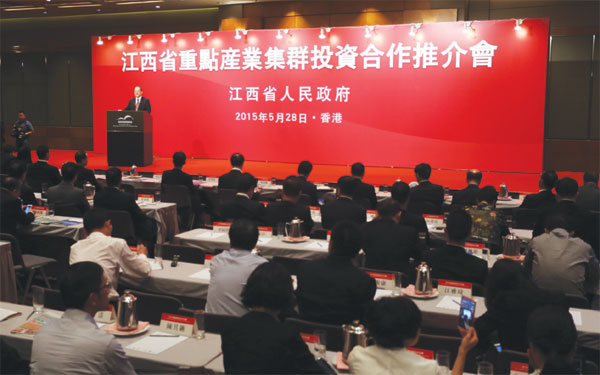
- In like manner, you can see the American
Nimitz-class aircraft carrier USS George Washington visiting Hong Kong
harbor.
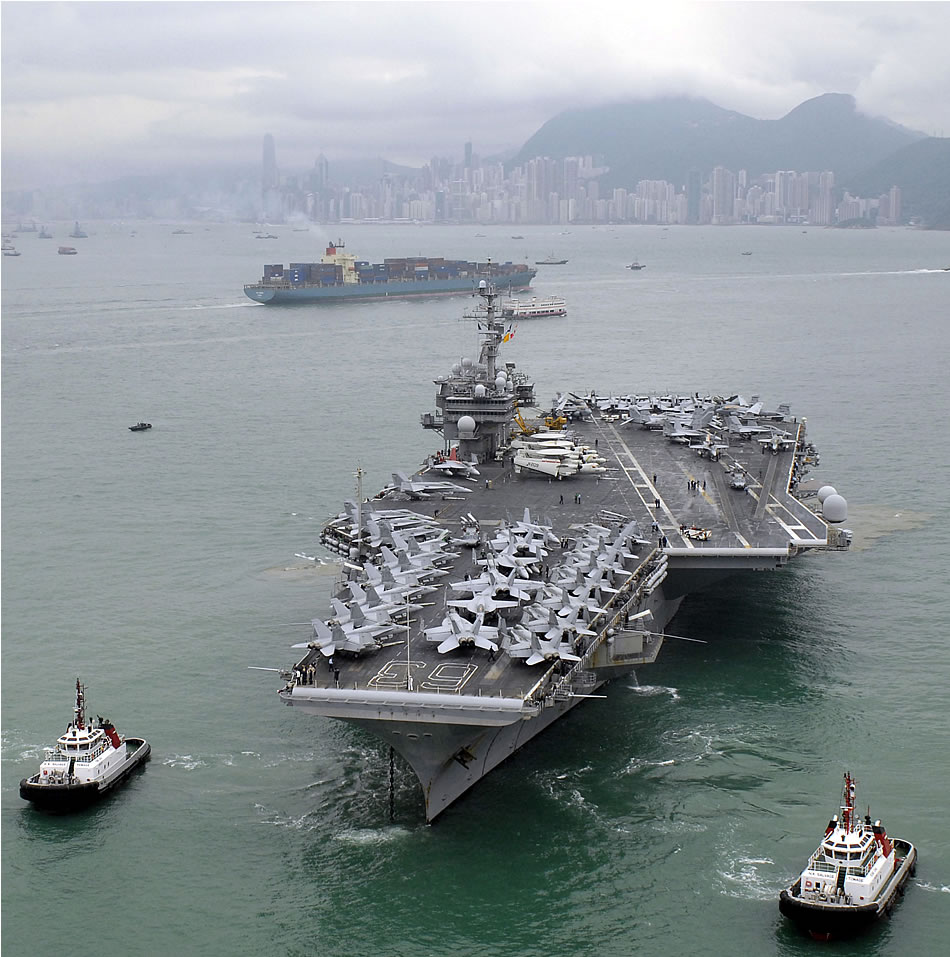
But you will probably never see the Chinese
aircraft carrier Liaoning in Hong Kong during your lifetime.
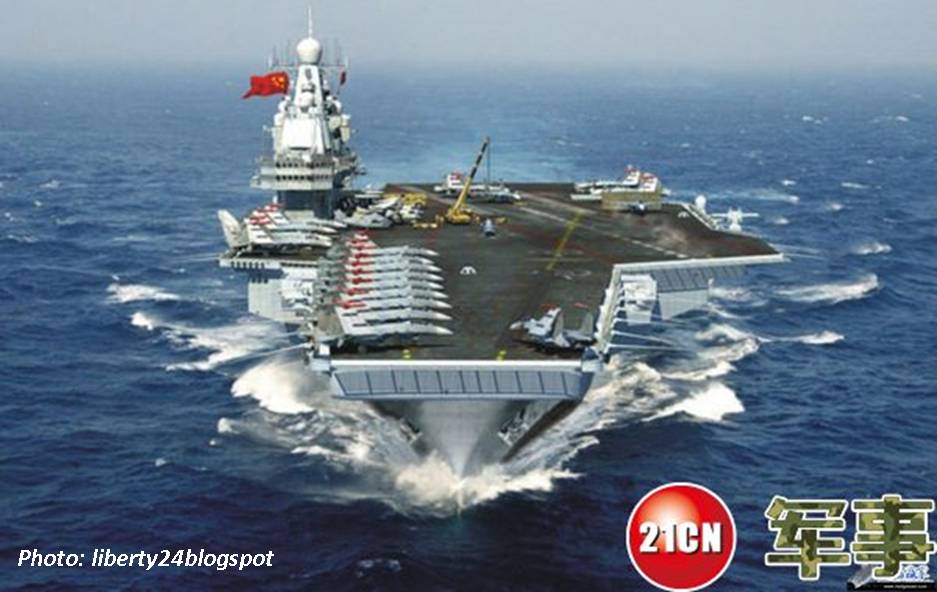
While the Basic Law does not forbid
Liaoning from visiting Hong Kong, many pro-democracy activists are bound
to say that they will be fearful if this were to take place. In deference to
this type of reaction, Liaoning will be kept out of Hong Kong.
(EJinsight)
May 7, 2015.
After Chinese University of Hong Kong graduates voiced their concern about
a proposed visit by People’s Liberation Army troops to the campus, the
university suspended the visit at the last minute.
CUHK and the PLA apparently agreed on the
suspension.
The
move is consistent with the principle that the role of China’s army in
Hong Kong shouldn’t go beyond the defense of the city, as provided in the
Basic Law.
Article 14 states: “Military forces stationed by the Central People’s
Government in the Hong Kong Special Administrative Region for defense
shall not interfere in the local affairs of the Region.”
Last month, the Postgraduate Student
Association of CUHK, which is heavily dominated by students from mainland
China, invited members to join a May 8 event described in the email
invitations as a “People’s Liberation Army Hong Kong Garrison and CUHK
students fellowship activity”. It said dozens of PLA soldiers would visit
the campus, attend classes and have lunch with vice chancellor Joseph
Sung Jao-yiu. Then off they would go to play basketball with CUHK
students. However, the event was kept a secret from most of the local
students, and even the CUHK student union did not know about it.
There’s no doubt that the PLA entering a
university campus is a sensitive issue, even after Hong Kong has been
under Chinese rule for almost 18 years. The campus is a wellspring of the
success of Hong Kong.
Freedom of expression and academic
freedom prevail there, and students and scholars can conduct their studies
and research without any external interference. Students from everywhere,
including those from the mainland, enjoy the same rights at CUHK.
On the other hand, the PLA, which serves
the interests of the Communist Party of China, has the responsibility to
maintain the nation’s sovereignty in all aspects. A visit by the PLA to
the campus, even if a friendly one, would understandably trigger fears of
pressure being brought to bear on academic freedom, even if only on a
psychological level.
That’s why 163 CUHK graduates backed an
online petition titled “No PLA on the Campus”. While the response wasn’t
great, at least it drew the university’s attention to the issue and led to
the suspension of the visit. The university said the suspension was due to
“some students misunderstanding the purpose of the event”, and thus the
visit would fail to achieve its original purpose.
- I would be surprised to be surprised. It
is no surprise that a senior barrister would stand up for an apparent
violation of the law. It is also no surprise that this senior barrister
refuses to denounce the 79-day illegal Occupy Central.
- In 2010, the Democratic Party stepped
inside the China Liaison Office to negotiate the deal in which they traded their votes in return for
increasing 10 more Legco seats of five directly elected geographical
constituencies and five directly elected
Super District Councilors.
(Ming
Pao) June 21, 2015.
After the government's
constitutional reform proposal failed to be passed by the Legislative Council,
the Civil Human Rights Front, Scholarism and others are proposing to amend the
Basic Law. Civil Human Rights Front convener Johnson Yeung Ching-yin wants to
redefine the power relationship between Hong Kong and the central government.
However, the Democratic Party and the Labour Party thinks that amendments of the
Basic Law should be restricted solely to Article 45 on universal suffrage to
elect the Chief Executive including the elimination of the nomination committee
and Article 68 on universal suffrage for the Legislative Council including the
elimination of the functional constituencies.
Previously, the pan-democrats have
reached agreement on Basic Law amendments with the Federation of Students/Scholarism
during the discussions on the resignation of Legislative Council(s) to force a
de facto referendum. This was going to be one theme of the referendum.
Meanwhile the Civil Human Rights Front have also listed Basic Law amendment as
one of the theme's in this year's July 1st march.
(SCMP)
Pan-democratic heavyweights warn of risks in revising Hong Kong's Basic Law.
June 8, 2015.
A fresh dilemma is looming for mainstream
pan-democrats as their allies from civil rights groups advocate an amendment
to the Basic Law as a new direction in the pursuit of genuine universal
suffrage when the present debate on reform ends.
Trying to revise the city's
mini-constitution is too time-consuming, if not downright dangerous,
according to pan-democrats including Civic Party chairwoman Audrey Eu
Yuet-mee and Democratic Party chairwoman Emily Lau Wai-hing.
The law in question is Article 45, which
stipulates only a nominating committee can name chief executive candidates
when universal suffrage is introduced.
The idea of amending it became the talk of
the town after leaders of the student unions of four universities burned a
copy of the Basic Law last week, during an annual candlelight vigil at
Victoria Park commemorating the Tiananmen Square crackdown.
Lau noted the students' frustration over
stagnating democratic development. But modifying the law was fraught with
danger as it would open the way for Beijing to tighten constitutional
provisions that had protected Hongkongers' rights and freedom, she warned
yesterday. "[I] do not oppose any discussion … but we must be very careful
in dealing with the matter, which is full of traps," she said.
At the burning of the book on Thursday, the
student leaders argued Article 45 served only the interests of Beijing and
tycoons.
Following the move, almost 30 disparate
pro-democracy groups yesterday kicked off marches across the city against
the government's reform plan for the 2017 chief executive election, which
they said failed to offer voters a genuine choice of hopefuls.
The tertiary students' action was akin to
"dropping a bombshell", Civil Human Rights Front convenor Daisy Chan Sin-ying
said. Nevertheless, she said, they had floated a new idea that deserved more
debate after the legislature, as expected, voted down the government's offer
of "sham universal suffrage" this month.
The Federation of Students, the city's
oldest and the most politically active pupil group, also backed amending
Article 45.
But key pan-democratic politicians echoed
Lau's reservations about the idea.
Civic Party leader Alan Leong Kah-kit, who
convenes an informal grouping of 23 pan-democratic lawmakers, said effecting
changes to the Basic Law was not their top priority now. "What we want to do
is to get the central government to honour its promises, delivered to Hong
Kong since the 1980s and enshrined in the Basic Law," he said.
His party colleague Eu pointed out an
amendment would take a very long time and was not necessary to achieve
universal suffrage. Burning the Basic Law book might give the public the
impression the students opposed the "one country, two systems" principle
although they might not mean it, she said.
Basic Facts:
Basic Law Article 45
The Chief Executive of the Hong Kong
Special Administrative Region shall be selected by election or through
consultations held locally and be appointed by the Central People's
Government.
The method for selecting the Chief
Executive shall be specified in the light of the actual situation in the
Hong Kong Special Administrative Region and in accordance with the
principle of gradual and orderly progress. The ultimate aim is the
selection of the Chief Executive by universal suffrage upon nomination by
a broadly representative nominating committee in accordance with
democratic procedures.
The specific method for selecting the
Chief Executive is prescribed in
Annex I: Method for the Selection of the Chief Executive of the Hong
Kong Special Administrative Region. Plus
Instrument 3 and
Instrument 4.
Basic Law Article 68
The Legislative Council of the
Hong Kong Special Administrative Region shall be constituted by election.
The method for forming the Legislative Council shall be specified in the light
of the actual situation in the Hong Kong Special Administrative Region and in
accordance with the principle of gradual and orderly progress. The ultimate aim
is the election of all the members of the Legislative Council by universal
suffrage.
The specific method for forming the Legislative Council and its procedures for
voting on bills and motions are prescribed in
Annex II: Method for the Formation of the Legislative Council of the Hong Kong
Special Administrative Region and Its Voting Procedures. Plus
Instrument 5 and
Instrument 6.
Basic Law Article 158
The power of amendment of this Law
shall be vested in the National People's Congress.
The power to propose bills for amendments to this Law shall be vested in the
Standing Committee of the National People's Congress, the State Council and the
Hong Kong Special Administrative Region. Amendment bills from the Hong Kong
Special Administrative Region shall be submitted to the National People's
Congress by the delegation of the Region to the National People's Congress after
obtaining the consent of two-thirds of the deputies of the Region to the
National People's Congress, two-thirds of all the members of the Legislative
Council of the Region, and the Chief Executive of the Region.
Before a bill for amendment to this Law is put on the agenda of the National
People's Congress, the Committee for the Basic Law of the Hong Kong Special
Administrative Region shall study it and submit its views.
No amendment to this Law shall contravene the established basic policies of the
People's Republic of China regarding Hong Kong.
Internet comments:
- "Previously, the pan-democrats
have reached agreement on Basic Law amendments with the Federation of Students/Scholarism
..." The Federation of Students are down to four out of eight universities, and
Scholarism has no base support (it is a secondary-school organization with at
most 100 members led by people who are no longer in secondary school). Why are
their backroom agreements relevant to the people of Hong Kong and their
interests?
- How do you amend Basic Law
Article 45 and Article 68? You follow Basic Law Article 158 on amendments, which
says that you need (1) the consent of two-thirds of the deputies of the Hong
Kong Special Administrative Region to the National People's Congress; (2) the
consent of two-thirds of the deputies of the Legislative Council; (3) the
consent of the Chief Executive of the Hong Kong Special Administrative Region.
Strategizing means defining the ways by which these three parties can be
persuaded to agree with your demands. Marching on July 1st
to chant slogans such as "End one-party rule!" and "Down with the Communist
Party!" isn't a winning formula.
- Basic Law Articles 45 and 68
cannot be amended without first amending Basic Law Article 158. I propose the
following revision to Basic Law Article 158.
The power of amendment of this Law
shall be vested in the people of Hong Kong.
Amendment proposals are accepted
with a minimum of 10,000 signatures from Hong Kong permanent residents. Such
proposals shall be voted upon in a public referendum to be conducted by the Hong
Kong University Public Opinion Programme.
Any amendment that has more
support than opposition shall be submitted to the National People's Congress
Standing Committee which shall automatically approve it. The amendment shall not
be rejected just because it contravenes the established basic policies of the
People's Republic of China regarding Hong Kong.
- Of course, you were surely
joking when you said that the referendum shall be held by the Hong Kong
University Public Opinion Programme. You can vote as many times as you want on
the Internet with computer-generated Hong Kong ID's.
- The results of the
6.22 Civil Referedum conducted by the Hong Kong University Public
Opinion Programme:
If the government proposal cannot
satisfy international standards allowing genuine choices, LegCo should veto it.
87.8%: LegCo should veto
7.6%: LegCo should not veto
3.9%: Abstention
0.7%: Did not vote
0.1%<: Blank vote
0.1%<: Invalid vote
0.1%<: Refused to vote
Total number of votes: 792,808
(SCMP)
June 16, 2015.
... The latest HKU-POP poll - funded and
commissioned by Liberal Party lawmaker James Tien Pei-chun with a "supersize"
pool of respondents of 5,000 plus - covers both. Forty-eight per cent
supported the proposal, while 38 per cent opposed it. When asked which
button lawmakers should press, 51 per cent supported Legco passing the bill,
against 37 per cent who disapproved.
The Civil Referendum organized by the Hong
Kong University Public Opinion Programme ended up drawing only supporters
but not opponents of the limited number of proposals. It did not reflect the opinions of
the population as a whole.
- If you don't trust the Hong Kong
University Public Opinion Programme, then the government Registration and
Electoral Office can hold the referendum for registered electors. They have
the detailed voter information which they can verify.
- Yes, it only costs $100+ million each time to rent space and hire help at
more than four hundred locations across Hong Kong. Why don't we take that money
and split it among the people?
- Of course, we can run an omnibus referendum containing multiple proposals
(see, for example,
California ballot proposition).
- You are now trapped in an infinite loop.
In order to amend Articles 45 and 68, you need to amend Article 158.
In order to amend Article 158, you need to amend Article 158.
Well, you're stuck.
Is there any way to challenge Article 158? You can file a petition for a
judicial review by the Court of Final Appeal of the Hong Kong Special
Administrative Region. But with respect to any matter concerning the
relationship between the Central Authorities and the Region, that Court
shall seek an interpretation from the Standing Committee of the National
People's Congress (see
Basic Law Article 158). So you are back to where you were.
(SCMP)
Hong Kong reform package rejected as pro-Beijing camp walk out in
'miscommunication' June 19, 2015.
Hong Kong's legislature yesterday blocked
the government's electoral reform plan as a historic showdown between
pan-democrats and Beijing loyalists became a farce when the latter camp's
bungled walkout meant that only eight lawmakers voted for the plan.
There was utter confusion among the
government's allies when 31 of them left the chamber in the mistaken belief
the ballot would be adjourned while they waited for rural kingpin Lau
Wong-fat, who was stuck in traffic on his way to cast his vote.
The resulting fiasco ended two years of
debate and months of bickering on how Hong Kong could elect its chief
executive by "one man, one vote" in 2017.
All 27 pan-democratic lawmakers kept their
vow to vote no, and pro-establishment medical sector representative Dr Leung
Ka-lau added a 28th vote. That would have been enough to deny the proposal
the two-thirds majority it needed. But the pro-establishment camp's plan to
blame pan-democrats for the failure of reform was severely undermined, as
the walkout left just eight yes votes and a clear majority against the
package.
The eight who voted yes were the five
Liberal Party lawmakers, the Federation of Trade Unions' Chan Yuen-han, and
independents Lam Tai-fai and Chan Kin-por. Legco President Jasper Tsang Yok-sing
and labour representative Poon Siu-ping were present but did not vote.
(SCMP)
June 19, 2015.
A commentary published in the People’s
Daily today said pan-democratic lawmakers should take the full
responsibility for obstructing democratic development in Hong Kong. “The
opposition lawmakers’ perverse act of voting down the electoral reform
proposal went against mainstream public opinion in Hong Kong. It exposes
their true colours of opposing democracy while chanting slogans fighting for
democracy,” the Communist Party’s mouthpiece said.
“The opposition is actually opposing ‘one
country, two systems’ and the Basic Law. The biggest political issue in the
18 years since the handover is some people in Hong Kong don’t accept the
fact that China has resumed Hong Kong’s sovereignty,” the commentary said.
The commentary said the pan-democrats were
actually struggling with the central government for the power to govern Hong
Kong through the rejection of the reform package, adding that they were
attempting to turn the city into an “independent political entity”.
The newspaper said the central government
would continue to implement “one country, two systems” unswervingly and
support Hong Kong to achieve the ultimate goal of universal suffrage.
(The
Stand News)
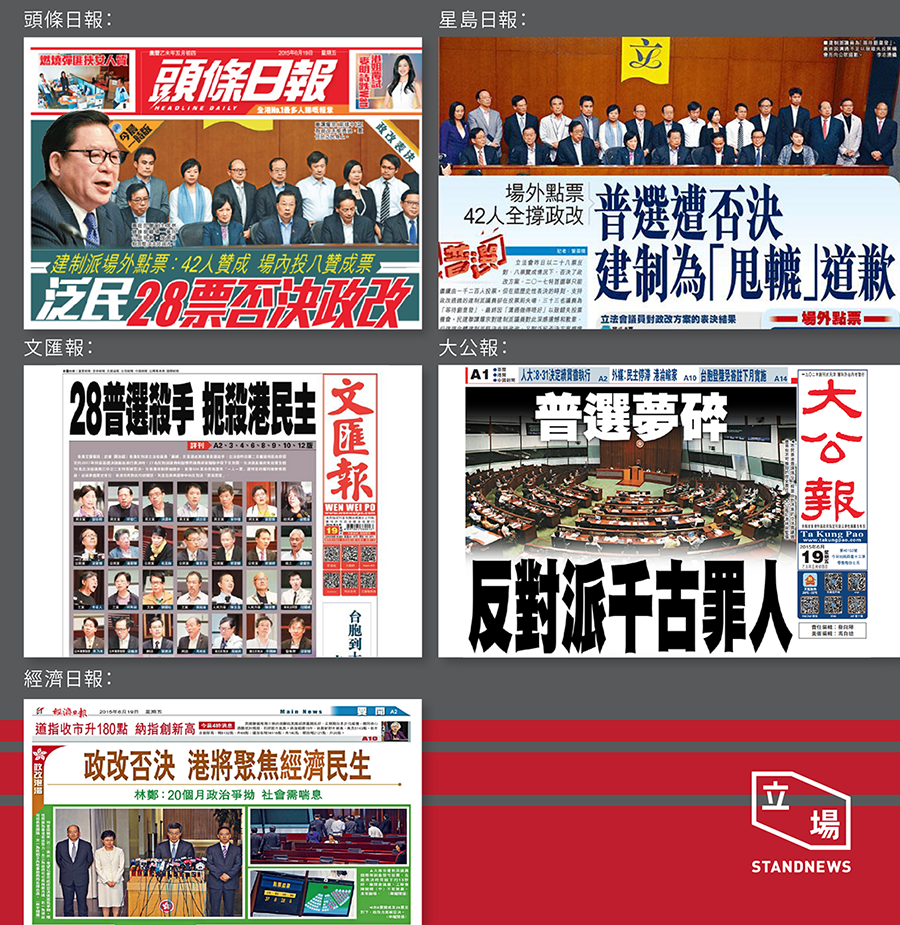
- The government's constitutional
reform proposal was voted down by a majority of 28 votes NAY to 8 votes AYE. But
many pro-establishment newspapers handled the outcome in a deliberately
low-keyed manner. Sing Tao and Headline News, both from the Sing Tao Group, used
the headline "Vote tallying outside the Legislative Council" for their report
that they canvassed the pro-establishment legislators and all 42 of them
supported the government's proposal.
(SCMP)
Finger points to a second term as Hong Kong CE for Leung Chun-ying. Alex Lo.
June 3, 2015.
As the government electoral reform package
was voted down, the lack of a clear political cause made many protesters at
the July 1 march - the smallest in years - resort to shouting that old
pan-democratic chestnut: down with Leung Chun-ying.
The ironic thing is, if the reform package
had passed, the chief executive's chance of securing a second term would
have been extremely low. That would be simply a matter of arithmetic, given
his low popularity rating. He might not even enter the race.
But now we may be in for seven years of
Leung. This is because as the reform fails, we are back to the old "small
circle" system of selection, with the 1,200-strong Election Committee.
Suddenly, a Leung second term looks considerably likely. Indeed, he may have
been the biggest beneficiary of the reform's failure, thanks to all the
pan-democratic lawmakers and their united "No" vote.
That was what a few pro-establishment
politicians such as James Tien Pei-chun had warned when they used Leung as
the boogeyman to try to scare people into supporting the reform. They were
ridiculed back then. Now we are staring at that very real possible outcome
they warned against. That may be why Leung now appears in public with
renewed confidence and with a spring in his step. Barely half a year ago,
shortly after the end of the Occupy movement, he looked wary and grey.
There may have been short periods when
Leung's plunging popularity ratings so alarmed Beijing that it had doubts
about his ability to govern. There was a time when his public outings were
dogged by angry protesters like those from Scholarism. Now it's those kids
from Scholarism like Joshua Wong Chi-fung and his girlfriend who get
harassed in the streets while Leung and his lieutenants often manage to make
public appearances unmolested.
He is again Beijing's man. Come 2017, his
odds of being "reselected" will be all in his favour. If nothing else,
Beijing will want to impose Leung on Hong Kong as a punishment for rejecting
the electoral reform and challenging its prestige. It's also Beijing's way
of reciprocating to the pan-democrats who have given it the finger one too
many times.
Internet comments:
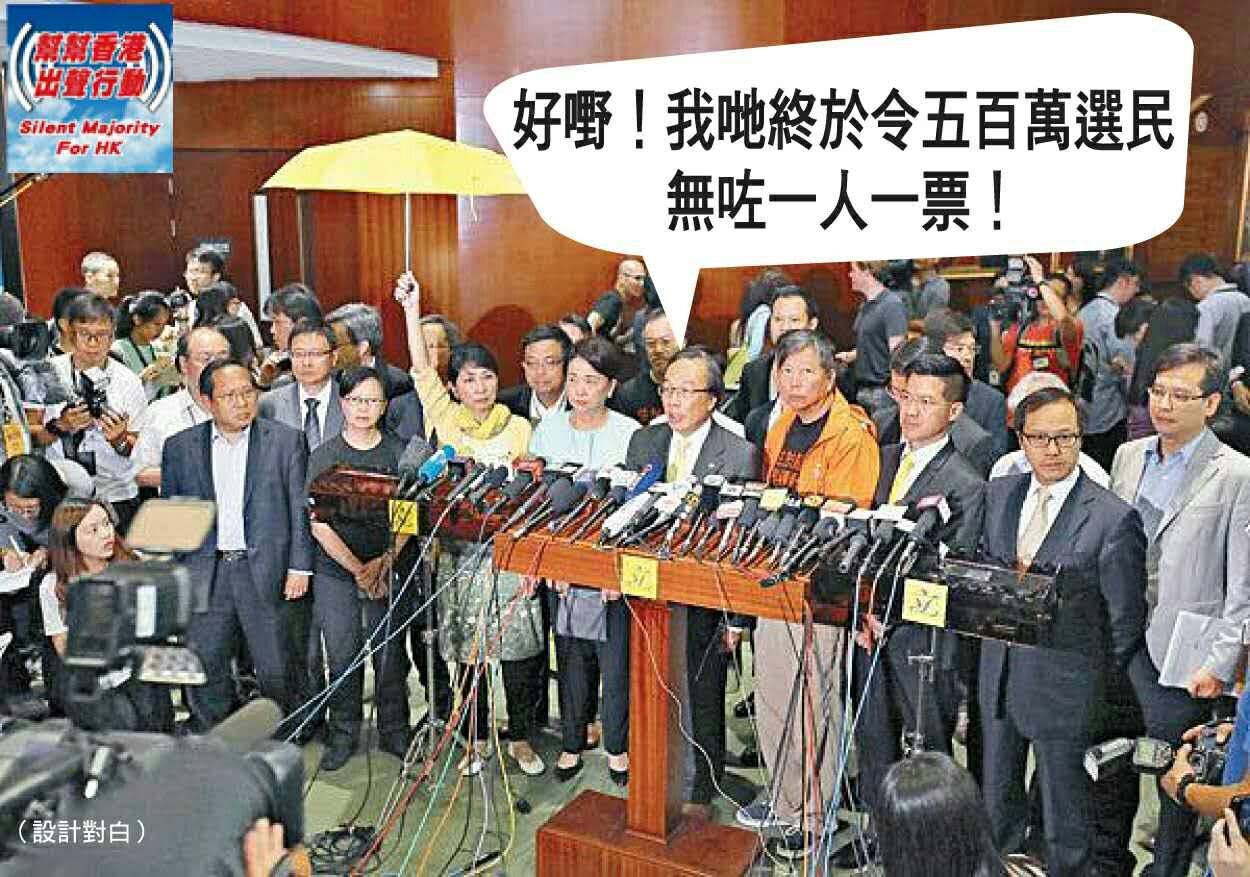
- "Hurrah! We finally made 5 million voters lose
one-person-one-vote to elect the Chief Executive!"
- Here is the summary: The
pan-democrats vetoed a bill that has the support of the people of Hong Kong so
that future Chief Executives will continue to be elected by a 1,200-person
election committee for the foreseeable future.
- (Discuss.com.hk)
June 18, 2015.
When you read the newspaper
reports today, you might think that the Chinese Communists suffered a huge loss.
But here is my scorecard for the day:
Pan-democrats: Huge loss
Central government: Huge victory
Pro-establishment camp: Small victory
Localists: All for nothing.
Foreign forces: Huge loss
How so?
(1) 1,200 election committee
continues to elect a pro-China Chief Executive in 2017
(2) Functional constituencies continue in Legislative Council to provide a
pro-China majority
(3) CY Leung stands an excellent chance of being re-elected
(4) Pan-democrats vetoed one-person-one-vote and now own the responsibility
(5) Radical elements ready to instigate trouble after the vote had nothing to
rage about
(6) USA/UK/EU failed to disrupt Hong Kong's social order and profit from
short-selling the Hong Kong/Chinese stock markets
This was an awesome performance by
the Chinese Communists. Everything worked according to their script. This was
the outcome that they wanted, and the pan-democrats obliged them. And the
Localists became collateral damage too.
- Immediately after the fiasco at
the Legislative Council came a flood of reports from 'informed Beijing sources'
that many heads (at the Politburo (Zhang Dejiang), State Council, National
People's Congress (Li Fei), China Liaison Office (Zhang Xiaoming), CY Leung, the
political reform trio of Carrie Lam, Rimsky Yuen and Raymond Tam, Legco
president Jasper Tsang, the eight who were present to vote AYE, various
political parties (Liberal Party, DAB), etc) will roll because Xi Jinping/Li
Keqiang/Zhang Dejiang/Zhang Xiaoming/CY Leung are pounding on their desks in
rabid anger. These reports are not credible because the sources are all
anonymous. Worse yet, they are made out as if they are highly placed sources.
Here is the dilemma: If you don't
have a highly placed source, then that information is suspect because the source
is not in a position to know state secrets. If you claim to have a highly placed
source, then that information is suspect because such a source is likely to be
selling state secrets to foreign forces for big money instead of leaking it to a
credibility-deficient tabloid newspaper/website based in Hong Kong/USA.
These are good sources of
entertainment (like Bo Xilai paying Zhang Ziyi $700 million to sleep with him),
but not good sources of information.
- (Bastille
Post) The road to democracy. June 19, 2015.
It is a fact that the
constitutional reform would not have passed even without that odd happening.
Nothing was going to change that.
The 27 pan-democrats plus the
Medical sector's Leung Ka-lau voted NAY to veto the bill. Then they said to
immediately re-start the 5-step process for constitutional reform. How do they
go about doing this? Do they put a knife at the throat of the Hong Kong SAR
government by threatening to filibuster and obstruct everything so that the
central government must yield unconditionally to their demands? And if the
pan-democrats offer a bill based upon civil nomination of Chief Executive
candidates, are they going to get a 2/3 majority in the Legislative Council?
When the pan-democrats first
talked about Occupy Central to pressure the central government/Hong Kong SAR
government, the National People's Congress Standing Committee immediately
responded with the August 31st resolution. According to information, the draft
resolution began with with "With respect to the Hong Kong SAR Chief Executive
election by universal suffrage in 2017 ..." In the final version, "in 2017" was
excised. This means that the August 31st resolution will be valid not just for
2017 but also for any future Chief Executive elections until as such time when it
has been field-tested. People compared this to eating a baked cake. If you don't
want to eat it now, it can be put away. When you want to eat later, the cake
will be reheated in a microwave and brought out for you. It is the same old
cake. If you want to eat a new cake, you will have eat the old one first. The
cake will not be thrown out until it has been tasted. Such is the wish of the
central government.
The pan-democrats want to bend the
central government according to their will. Are they powerful enough? The
pan-democrats are playing "all-in show hand" poker with the central government
all the time. The central government is not obliged to play along. This time,
the central government played a card that turned out to have greater public
support than not. Even if the foreign forces want the pan-democrats to take the
offer. But the pan-democrats tossed the card away. This is only going to make
the central government even less willing to implement democracy in Hong Kong.
In the history of the world,
democratic development comes from either bloody revolution or
compromise/concession. In Hong Kong, conditions do not exist for a revolution.
If Hongkongers don't have the wisdom to make compromises and concessions,
nothing will come out of this.
- (TVB)
Civic Party legislator Alan Leong said that the veto of the constitutional
reform proposal is a message to the central government about the demand for
genuine universal suffrage. He called on the Hong Kong SAR government to
re-start the constitutional reform as soon as possible.
What is "as soon as possible"?
5-Step Process of Constitutional
Development:
- The Chief Executive to make a report
to the National People's Congress Standing Committee as to whether there
is a need to amend the two electoral methods
- A determination to be made by the
NPCSC as to whether the electoral methods need to be amended
- The resolutions on the amendments to
be introduced by the HKSAR, Government to the LegCo, and be endorsed by
a two-thirds majority of all the members of the LegCo,
- Consent to be given by the CE to the
motions endorsed by the LegCo, and
- The relevant bill to be reported by
the CE to the NPCSC for approval or for the record.
So the first step is to find a
Chief Executive who is willing to make a report to the National People's
Congress Standing Committee. The current Chief Executive CY Leung has stated
that he has no intention of doing anything about constitutional reform for the
rest of his term. His term runs out in 2017.
In 2017, a new Chief Executive
will be elected by a 1,200-person election committee. CY Leung has not indicated
whether he will run again or not. If he runs and is re-elected, then he probably
won't touch constitutional reform. His second term ends in 2012. If he does not
run or if he run but is not re-elected, another Chief Executive may or may not
want to touch constitutional reform. Why not? If on one hand, the pan-democrats
won't budge because civil nomination is a sine qua non for them and, on
the other hand, the National People's Congress Standing Committee insists that
its August 31st has no expiry date and won't be amended until field-tested, then
it is a waste of everybody's time and effort to go through the five steps. It
will be the 2015 vote all over again.
It is said that there may be a
chance that the new Chief Executive elected in 2017 may re-start the
constitutional reform. That is a 'maybe'. That Chief Executive can save some
time and effort for everybody by asking the pan-democrats up front: "Do you
accept the NPCSC's August 31st framework?" If not, he/she should stop
immediately. The funds (for printing pamphlets, holding town hall meetings, etc)
can be better spent (such as direct payouts to senior citizens).
- It is not true that there is no
end in sight.
At the latest, all this will be
resolved in 2047 when One Country Two Systems expires and One Country One System
takes over. Then Hong Kong will follow whatever they've got in China at that
moment. That much is certain.
But the end could be even earlier,
perhaps in a couple of years. Occupy Central founder and Chinese University of
Hong Kong associate professor Chan Kin-man has said that China may collapse
really soon and then Hong Kong will get the opportunity to become independent.
So the end may be very close! If we can keep our faith, join hands and pray
together, God will deliver us from evil. Amen.
- Yet another way is for the Hong
Kong University Public Opinion Programme to hold yet another public referendum
to vote on civil nomination of Chief Executive candidates. If the public
approves, then this becomes the law of the land.
- Been there, did that. Robert Chung can get 700,000 signatures to support civil
nomination, and Robert Chow gets 1.8 million signatures to support the
government's proposal with the 1,200-person nomination committee.
- 'The law of the land' does not contain any mention of binding referendum
results. You are masturbating again ...
- Of course, if the referendum results are not in your favor, you would
immediately repudiate it and say that your own conscience is more important than
majority opinion. Meanwhile if the referendum result is in your favor, you would
immediately say that it must be respected.
- Alan Leong suggests that the
Hong Kong SAR government and the central government have the constitutional duty
to implement universal suffrage for the Chief Executive. The vetoed proposal
follows
Basic Law Article 45 and
Annex I, which Leong rejects. So the governments have discharged
their constitutional duty but Leong and friends refused.
Meanwhile, the Hong Kong SAR government also tried to introduce
Basic Law Article 23 legislation because they have the constitutional
duty to do so. Leong and friends also vetoed that.
So what Alan Leong is really saying that the Hong Kong SAR government and the
central government have the constitutional duty to do whatever he says PERIOD. I
hope this is sufficiently clear.
- According to the radical
elements, if Basic Law Article 45/Annex I are standing in the way, then an
amendment is in order to permit civil nomination.
According to the same radical elements, the Chinese Communist Party is
illegitimate and therefore one-party rule must end!
So why do the radical elements want the illegitimate Chinese Communist Party to
amend the Basic Law for them?
- Amazingly, Alan Leong did not
get to the main point. Or perhaps he did but TVB did not air it. Here is that
usual main point: "The road to democracy is long and hard, but we will continue
to fight for FREEDOM, DEMOCRACY, HUMAN RIGHTS, UNIVERSAL SUFFRAGE and RULE OF
LAW. Therefore, the people of Hong Kong should continue to vote for us so that
we can continue to fight for FREEDOM, DEMOCRACY, HUMAN RIGHTS, UNIVERSAL
SUFFRAGE and RULE OF LAW. And, most important of all, don't forget to donate
money to us so that we can continue to fight for FREEDOM, DEMOCRACY, HUMAN
RIGHTS, UNIVERSAL SUFFRAGE and RULE OF LAW.
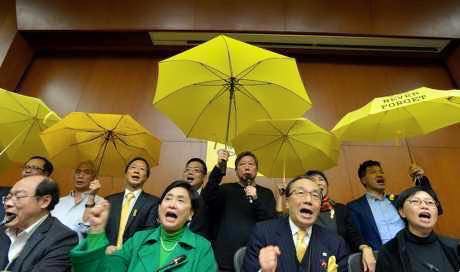
"I want genuine universal suffrage"
"I want you to keep donating your money to me."
- Now you're really talking. The
heart of the matter is that pan-democrats do not want FREEDOM, DEMOCRACY and
UNIVERSAL SUFFRAGE. If these things actually arrive, the pan-democrats will
become redundant. If they are not needed to RESIST and FIGHT, they lose their
$90,770 monthly salary plus donations. Revolutionaries need permanent
revolutions or else they may be forced to become working persons.
- In like manner, the Alliance to Support Patriotic Democratic Movements in
China cannot really permit June 4th to be vindicated, because they wouldn't know
what to do with themselves anymore.
- In this case, the pan-democrats, the pro-establishment camp and the central
government don't want one-person-one-vote and prefer to remain the same place.
So they staged a slapstick comedy for your entertainment.
- Unfortunately, the pan-democrats did not know beforehand. If so, five of them
could have voted AYE so that the final vote was 23 NAY versus 13 AYE, and the
bill failed to pass because the 34 others failed to come in and vote AYE.
- I am completely unconcerned because:

- Alan Leong also called for the
government to repair the social rifts. WTF! What has done more to cause social
rifts than Occupy Central? And here is Alan Leong being led away at the end of
Occupy Central.
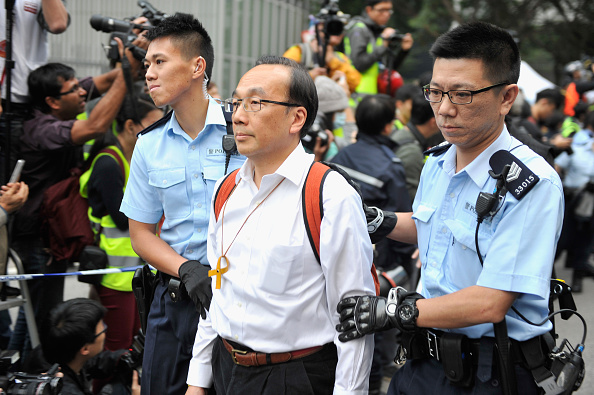
- Here is the new and improved
five-step constitutional reform process:
Step 1: Pan-democrats Occupy Central again
Step 2: Pan-democrats run nightly Shopping Revolutions in Mong Kok again
Step 3: Pan-democrats raise the specter of Hong Kong independence (by attacking
mainland tourists, etc) again
Step 4: Pan-democrats destroy Hong Kong's economy again
Step 5: Pan-democrats veto the next constitutional reform proposal again
- Dialogue
Pan-democrats: I want genuine universal suffrage!
Central government: The August 31st resolution still stands.
Pan-democrats: I want the five-step constitutional reform process to re-start!
Central government: The August 31st resolution still stands
Pan-democrats: We call upon all citizens to pour onto the streets and Occupy Central
again!
Citizens: DLLM! Are you done yet?
- (Bastille
Post) On RTHK, Occupy Central founder Benny Tai said that over
the past
two years, 800,000 people have participated in the civil referendum and
Central
was occupied for 79 days. While it may seem that nothing was gained,
many Hongkongers are now awakened and they will not sit there and wait
for handouts
from the authorities. But Benny Tai did not offer any concrete strategy
to fight
for democracy.
Benny Tai is offering an optimistic fantasy. When Benny Tai and company brought
out Occupy Central, they said that if we follow his formula to paralyze Central
for two days and then surrender ourselves en masse to flood the police stations,
the central government will give up and we will have democracy. Nothing like
that happened. So why would you listen to any more Benny Tai predictions?
- (Bastille
Post) Two little pigs.
A completely stupid thing happened
at the Legislative Council as the pro-establishment legislators made an
elementary mistake and failed to cast their votes. This incident drew attention
fully towards that mistake. Many pan-democrats were delighted about the
constitutional reform proposal that received the lowest support rate in Legco
history. Some are saying: "You are not afraid of having wolves as enemies; you
should be afraid of having pigs as your allies."
But the pan-democrats were just as
piggish in their strategy to fight for democracy for Hong Kong. When the
National People's Congress Standing Committee made its August 31st resolution,
the pan-democrats proclaimed this is be "sham universal suffrage." But even the
foreign forces such as the United States, the United Kingdom and the European
Union were telling them to take the deal. Supposedly, the central government was
uncertain just how much influence the foreign forces have on the pan-democrats.
If they are influential, they should be able to get five pan-democrats to vote
for the proposal. In the end, the foreign forces could not make a single pan-democrat
switch positions.
In retrospect, why did the foreign
forces support the constitutional reform proposal? You could say that the United
Kingdom wanted to do business with China, but the United States did not have to
do so. Clearly, they knew that even if the nomination process is restrictive,
the Chief Executive will ultimately be elected by 5 million voters. This would
have been a milestone in the development of democracy in Hong Kong. No matter
who is running for Chief Executive, that person cannot go against public
opinion. This implies a qualitative change in Hong Kong democracy. Although the
proposal is flawed, it is very positive step forward. That is why the foreign forces wanted
the pan-democrats to pocket the offer.
However, none of the
pan-democratic political parties wanted to take the fall. So that was how this
proposal got vetoed. They failed to see how the central government was granting the right to elect in exchange for stability. Therefore, the pan-democrats
were as stupid as pigs in their strategizing. It took two unmatchable pigs to
bring the curtains down on constitutional reform.
What happens next? The
pro-establishment camp is obviously still crying over the debacle. But the
pan-democrats should not be smiling. There is no clear way for them to force the
central government to re-start the five-step constitutional reform process. Therefore the first
consequence of the veto is that the development of democracy in Hong Kong is now
completely stalled. For the next 5 years, perhaps even 10 years, the
central government won't be willing to re-start constitutional reform.
- Fast forward to April 22, 2017 (SCMP).
Beijing has poured cold water on Hong Kong’s electoral
reform aspirations, saying the city had pressing livelihood concerns to
handle in the coming five to 10 years.
“Political reform has failed after so many years. “[Hong Kong]
cannot afford to dedicate energy to political reform in the next five or 10
years, but not to housing, people’s livelihoods and the economy,” Wang Zhenmin
(Central Government's Liaison Office legal chief) told an
academic conference on Hong Kong affairs held in Beijing on Saturday.
- (SCMP)
Like democracy, keep national security law on back burner, too. By Alex Lo.
April 24, 2017.
The city’s political blogosphere and social media were
set ablaze when the central government’s liaison office’s legal chief,
Wang Zhenmin, said at the weekend that Hong Kong would not have
democracy in the coming decade.
As if having timed their incendiary comments, Wang Junli,
the former deputy head of the People’s Liberation Army garrison in Hong
Kong, compared the city’s situation to Taiwan, Tibet, Xinjiang and the
South China Sea, meaning the introduction of a national security law
under Article 23 of the Basic Law was urgent.
Their remarks made good newspaper headlines, but were not
saying anything we didn’t know already. After pan-democratic lawmakers
voted down the government’s electoral reform in 2015, there was in fact
no further prospect for universal suffrage anytime soon. You can blame
the central government for imposing the restrictive framework on the
reform. Or you can blame the pan-democrats and their allies for
undermining it for Hong Kong people. But it is what it is; and Wang
Zhenmin is just spelling it out.
However, he is probably not commenting on democracy as
such, but rather telling chief executive-elect Carrie Lam Cheng
Yuet-ngor what to do. That’s what the legal chief meant when he said:
“[Hong Kong] cannot afford to dedicate energy to political reform in the
next five or 10 years, but not to housing, people’s livelihoods and the
economy.” That will pretty much cover the period of Lam’s first term,
and perhaps her second as well.
That should suit her just fine. If there is no prospect
of success for democratic reform, she would be perfectly justified not
to touch it with a 10-foot pole.
Of course, Wang Zhenmin’s quote is just as true if we
substitute “political reform” with “Article 23”, which we also can’t
afford to expend energy on over more pressing livelihood issues. Wang
Junli’s claims notwithstanding, Hong Kong is no threat to the nation in
any way, because our localist provocateurs are nothing but a joke.
Pan-democrats like to quote the Basic Law by saying we
have a constitutional duty to establish full democracy. Well, we have
the same constitutional duty for Article 23, too, so let’s not get on
our high horses.
We have failed spectacularly trying to legislate political reform
and a national security law. In the process, we have inflicted untold damage on
our body politic. Let’s give both of them a rest, for now.
- (HKG
Pao) How to overturn the NPCSC's August 31st resolution? By Shih Wing-ching.
June 19, 2015.
... According to the
pan-democrats, the August 31st resolution is unconstitutional. That is their
view, but the National People's Congress Standing Committee does not look at
it this way. According to western parliamentary practice, the pan-democrats
should lobby the NPCSC about the reasons and persuade them to see it the
pan-democrats' way. Thus, the NPCSC may reverse its decision at their next
meeting.
But the pan-democrats are not
doing that, because they think that the Communists control the rubber-stamp
NPCSC and lobbying won't be effective.
If that is the case, the
pan-democrats must lobby the central government leaders. Unfortunately, the
pan-democrats also think that contacting Chinese Communists is proof of
betrayal of the democracy cause. They don't dare to hold secret discussions with
Chinese Communist officials because they are afraid of being accused of
striking secret deals or being bought. Therefore, when they meet with
Chinese Communist officials, it is always as a group such that they can monitor
each other as well as establish their own innocence.
Such meetings become occasions in
which both parties re-iterate their positions with no opportunity to probe each
other or try for compromise. Nothing significant can come from these meetings.
The indications are that the
pan-democrats have no intention of lobbying the Chinese Communists. They are
more interested in calling the people of Hong Kong to join their resistance
campaign and stop the Communists from carrying out their plans for governance in
Hong Kong.
Unfortunately, these resistance
movements cannot shake the determination of the Chinese Communists to exercise
their sovereign rule. The Occupy Central movement gathered formidable support
and the citizens paid a high cost. But it could not change the NPCSC resolution.
To a certain extent, the August 31st resolution is the response of the Chinese
Communists to the Occupy Central movement. Therefore, a few more civil
disobedience campaigns will only make the NPCSC impose more restrictions on Hong
Kong.
Under the existing laws, the right
to interpret and amend the Basic Law lies with the National People's Congress
Standing Committee. When the NPCSC makes an evaluation, they will consider
national factors in addition to Hong Kong factors. When the pan-democrats run
resistance, they cannot just look at Hong Kong factors and ignore the NPCSC's
national concerns. Otherwise, Hongkongers will pay high costs without gaining
anything. Politicians must not care solely about political correctness while
ignoring practical feasibility.
- What do the "foreign forces"
have to say after the vote?
(Telegraph)
Hong Kong rejects Beijing-backed political reform package. June 19, 2015.
The UK was "disappointed" at Hong
Kong's failure to reform their system, said Hugo Swire, the Foreign
Office minister of state. "We continue to believe that a transition to
universal suffrage is the best way to guarantee Hong Kong’s stability
and prosperity, and is in everyone’s interest," he said. "We hope that a
constructive dialogue on future reforms can be established, reflecting
the aspirations of the people of Hong Kong and in accordance with the
Basic Law."
Alistair Baskey, a spokesman for the
White House National Security Council, said in Washington that the US
believed "the legitimacy of the chief executive will be greatly enhanced
if the chief executive is selected through universal suffrage".
(SCMP)
US plans to raise Hong Kong electoral reform at talks with top Chinese
officials. June 20, 2015.
Scott Robinson, spokesman for the US
consulate in Hong Kong, said the US government encouraged the Hong Kong
government, Beijing and the people of Hong Kong to continue to work
together towards the goal of achieving universal suffrage in accordance
with the Basic Law and the aspirations of Hongkongers.
"We believe the legitimacy of the chief
executive would be greatly enhanced if the chief executive were selected
through universal suffrage and if Hong Kong's residents had a meaningful
choice of candidates," he said.
"We greatly value our relationship with
Hong Kong and have a deep and abiding interest in its stability and
prosperity. Hong Kong's open society, rule of law and free market are
based on principles Americans and the people of Hong Kong share."
(EJinsight)
Chris Patten: Hong Kong will have democracy eventually. June 19, 2015.
Hong Kong will eventually have democracy, former governor Chris Patten
says, a day after legislators resoundingly rebuffed Beijing by voting
down its preferred selection method for the next chief executive.
Patten, Hong Kong’s last colonial
leader, told Apple Daily that Thursday’s defeat of the 2017 election
reform package marked a critical moment but does not mean the fight for
democracy is in a “dead knot”.
“Maintaining an open economy under rule
of law will surely lead to political consequences,” he said.
“For
a free city like Hong Kong that is rich in both software and hardware
infrastructure, what it now lacks is only the capability to elect its
own leader and such a situation will definitely not last forever,” he
said.
Patten rejected accusations Britain is responsible for social and
political divisions in Hong Kong, saying Beijing and some Hong Kong
politicians are to blame. He said China is bound by treaty commitments
under the Sino-British Joint Declaration, the basis of the change of
sovereignty.
Patten refused to comment directly on the election bill, saying “you all
know my views on democracy”. Asked how Britain can help Hong Kong fight
for democracy, he said the British government should talk about core
values.
Patten has been critical of London’s stance that Hong Kong people should
accept the electoral reform proposal in its present form and gradually
improve on it.
What they have to say is vacuous,
but it is what they didn't say (or cannot bring themselves to say) that is
interesting.
-
They can't say that the people of
Hong Kong were suppressed because they know that the support levels for the
government's proposal were higher
than the oppose levels in the public opinion polls.
-
They can't say that the
pan-democrats were wrong to reject a progressive step.
-
They can't say that the central
government refused to grant democracy to Hong Kong.
-
They can't say that the central
government must now craft a new bill according to the pan-democrats'
specifications.
-
They can't say that the
pan-democrats should now filibuster livelihood-related bills to force the Hong
Kong SAR government's hand.
-
They can't say that the
pan-democrats should proceed with Occupy Central II until the Hong Kong SAR
government cries uncle.
- (VJmedia)
June 19, 2015.
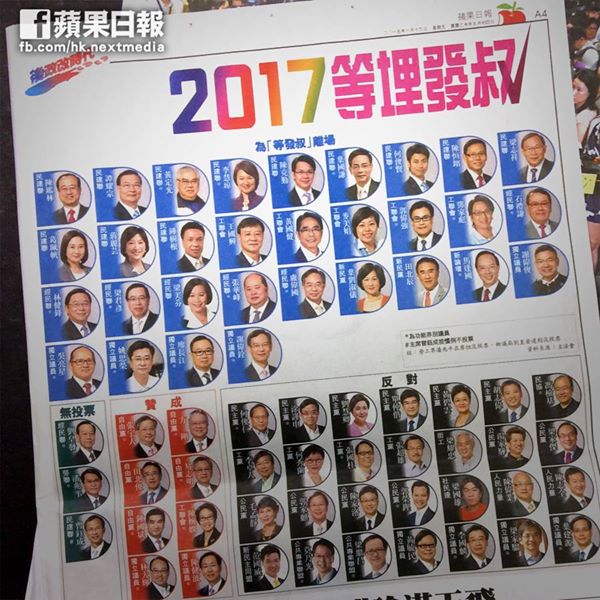
Apple Daily roster of who voted which way
June 18 2015 is a historical
moment for Hong Kong, because the 2017 Chief Executive election bill was vetoed
at the Legislative Council. This outcome carried no suspense because the
positions of the various legislators have been known for months already.
Surprisingly, there was an anti-climax with 28 NAY votes versus only 8 AYE
votes. Sometimes "you cannot help but laugh" (to quote the famous saying of CY
Leung).
Because of this farce, the media,
Facebook and whatsapp groups are making fun of the pro-establishment camp.
But what happens after the
laughing? What then?
The political storm will quickly
die off. But this is just the calm before the next political storm. The
government says that they will go back to focus on livelihood issues. But who is
going to believe that? When the 2017 Chief Executive election method is vetoed,
the plans are being immediately launched for the 2017 Chief Executive election
which will be held using the old rules. In 2017, the Chief Executive will be
elected by a 1,200-person election committee. So the potential candidates are
immediately sizing up this committee. For example, the incumbent CY Leung will
definitely be active if he wants re-election. The pan-democrats had better not
under-estimate their opponents.
In 2012, Leung "conned" his way to
become Chief Executive. This is unlikely to work in 2017 because he is a known
commodity now. The central government won't be fooled again. They won't allow
candidates to fight each other openly and then pick the winner at the end. They
will pick their candidate up front and then the election committee will vote for
that candidate. Therefore it will be hard for the other potential candidates to
obtain committee support.
The pan-democrats will be on the
outside looking in at the Chief Executive election. However, they can do battle
in the District Council and Legislative Council elections. But they will be
facing an unprecedented uphill battle. This time, they are not running against
Communist agents. They will be running against the Communists themselves with
more "Chinese" voters. Over the years, the pan-democrats have seen diminishing
voters and resources whereas the Communists have increased both voters and
resources. Within the pan-democrats, the Democratic Party are dying and other
political parties cannot attract votes. Some young people have gained reputation
through Occupy Central, but they won't be able to run in elections without the
help of large numbers of precinct captains.
- What is for certain is that in
the District Council and Legislative Council elections, there will be a large
number of 'colorless' candidates who say that they are coming out to serve the
people and they have no political positions. In truth, they have very firm
political positions but they can't make open declarations for fear of
automatically losing votes. So your best bet is to vote for someone with a loud
and clear political position, because you will at least know what you are
getting.
- The 2016 Legislative Council
elections are important. If the pan-democrats lose enough seats so that they
become less than 1/3, the 2017 Chief Executive will have the votes to pass a
constitutional reform based upon the NPCSC's August 31st framework.
- There are two schools of
thoughts about the Legislative Council elections in 2017.
According to one school of
thought, the pan-democrats will win in a landslide. Evidence:
(TVB)
TVB commissioned the Lingnan University Public Governance Programme to interview
1,115 adult Hong Kong permanent residents on June 9-12.
Q3. If the constitutional reform
fails to pass, who is responsible? (Multiple choices allowed)
42.8%: The HKSAR government
36.7%: The central government
18.0%: The pro-establishment camp
39.2%: The pro-democracy camp
According to another school of
thought, the pan-democrats will lose in a landslide. Evidence:
(Hong
Kong Research Association) 2,268 adults were interviewed by automated
telephone system on June 5-12.
Q8. If the constitutional reform
proposal is vetoed, who is the most responsible?
16%: The central government
51%: The pan-democrats
3%: The people of Hong Kong
18%: The HKSAR government
2%: The pro-establishment camp
1%: Others
8%: Hard to say
1%: No opinion
What is your pick?
- Conspiracy theory: Shortly
before the voting, it became known that there would be enough pan-democrats
switching to pass the bill. Why? Because if the bill was vetoed, the whole
constitutional reform issue goes away for at least a decade. But if the
bill was passed, there would be an immediate riot outside the Legislative
Council, the pan-democrats can start Occupy Central II and this becomes the
central issue of the 2015 District Council elections, the 2016 Legislative
Council elections and the 2017 Chief Executive election. Thus, the pan-democrats
win everything. Once the pro-establishment camp realized that, they walked out.
There were 36 legislators left. They would have needed 16 more pan-democrats to
join the 8 pro-establishment legislators. There was not enough time to organize.
And the designated pan-democrat switchers ended up voting NAY because the plan
had failed.
- What happened over these past
couple of years? Here is the summary: Daddy offers universal suffrage for
Chief Executive but spoiled brat throws it all away.
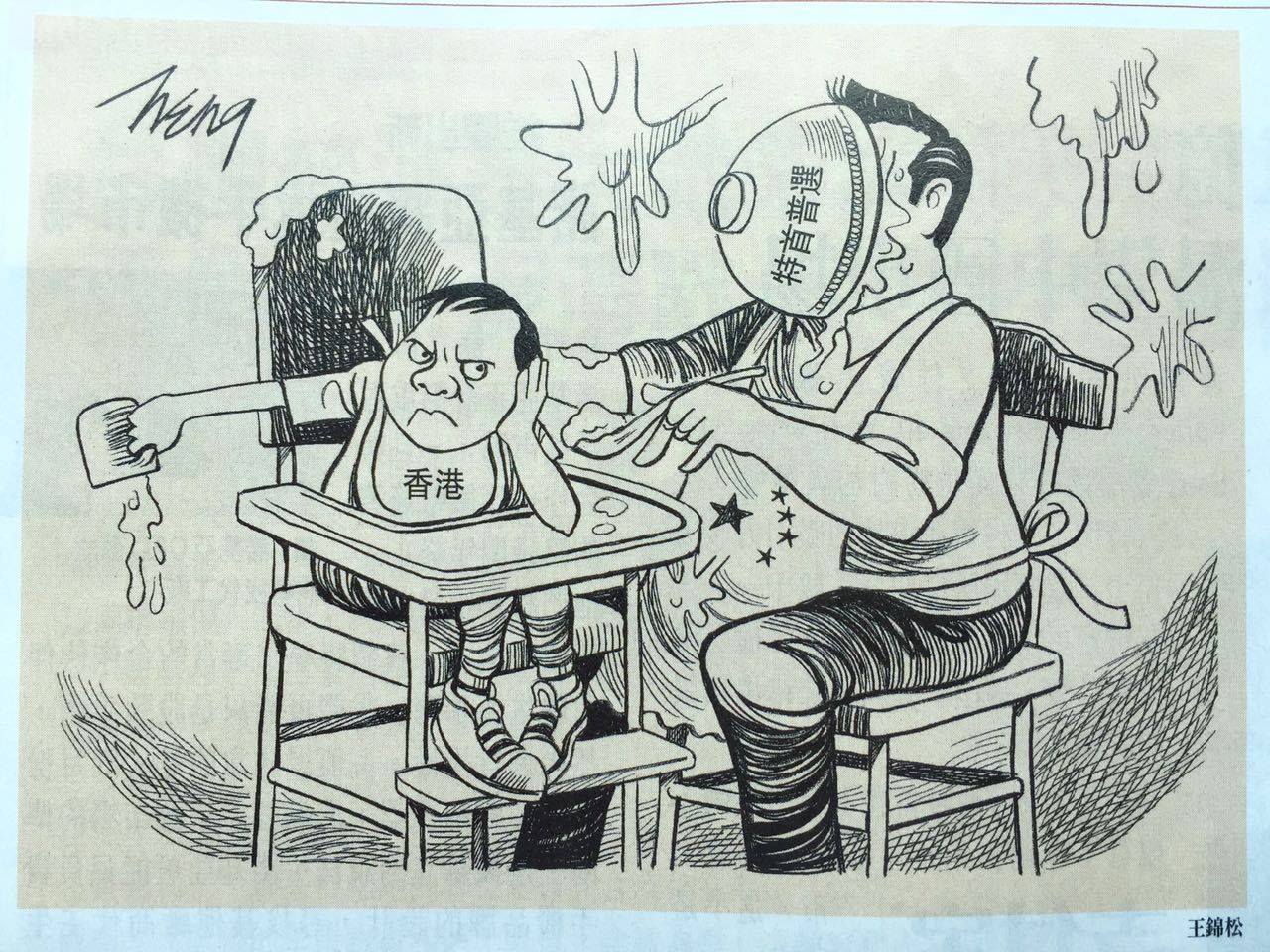
(Silentmajority.hk)
By Francis Lui. April 28, 2017.
In using game theory/economics to analyze a
problem, we examine the actors and consider the problem from the perspective
of their individual/group interests.
For the pan-democrats, do they really
support the election of a Chief Executive by universal suffrage?
The pan-democrats cover a wide political
spectrum with large differences in ideas. At this time, I cannot think of
any pan-democratic party that is preparing itself to become the ruling
party. Even if there is, they know that their ideas will run into conflict
with the Central Government and therefore they cannot possibly have
effective governance. Thus, their best bet is to continue to become the
opposition and the most basic requirement is that they have to oppose the
government.
If the Chief Executive is elected by
universal suffrage, the elected person will have far more votes than any
legislative council or political party. If you oppose that person, you
cannot call him 689 or 777, because that person may have 1,874,234 votes or
some such compared to your 38,171 votes. So even if the pan-democratic
politicians may say that they want "genuine universal suffrage," they must
know that their veto will make universal suffrage unattainable. But in the
game-theoretic analysis, they are working in a manner consistent with their
best interests.
Such being the case, why do they keep
demanding the restart of the constitutional reform process? This is where
they are smart. If the government actually restarts consultation, they can
mobilize the masses to oppose the government's proposal. This is how they
attract new adherents, siphon in donations and expand their organizations.
By contrast, when all is peaceful and quiet in society, they will have no
reason to exist.
For the government, the conflicts in Hong
Kong are both ideological and socio-economical in nature. The election of a
Chief Executive by universal suffrage is connected more to the former than
the latter. So which should the government focus on -- constitutional reform
or economic/livelihood issues?
If restarting constitutional reform merely
builds a platform for the opposition to oppose the government without
achieving universal suffrage, then the government should spend its time on
reducing the pressure from social issues such as high housing prices, etc.
If they succeed, their changes of realizing constitutional reform would be
better.
Therefore, according to game-theoretic
analysis, the government should not restart constitutional reform. If the
pan-democrats apply pressure, the government will respond that the
pan-democrats have shown that they will not accept the unmovable August 31st
framework.
Of course, the government will not be able
to resolve all the socio-economic problems in the short run. High housing
prices stem from insufficient land supply. Landfills will take decades to
implement, and brownfields affect the interests of too many parties.
Therefore this government won't be able to put housing prices under control
during its five-year term.
As for wealth inequality, the problems are
even more intractable. At this time, the Chinese economy continues to grow
and that should help Hongkongers' economic development. However very few
people are taking advantage of the opportunities. In fact, many people don't
even pay any attention to what is happening in mainland China. As a result,
their wages stagnate or even decrease, and the gap between them and those
who seize the economic opportunities will continue to grow.
Under such circumstances, there will
continue to social divisions and the pan-democratic camp will continue to
have a support base. But as the Chinese economy continues to grow and the
gap between Hong Kong and mainland China continues to grow, Hongkongers will
come to have better opinions about mainland China.
Over the next several years, the government
will have no incentive to restart constitutional reform. The pan-democrats
are in this strange position: On one hand, they want to government to
restart constitutional reform as soon as possible; on the other hand, they
kept insisting that they will "pocket" nothing except their "genuine
universal suffrage." Isn't this the perfect way of eliminating the incentive
for the government to restart constitutional reform?
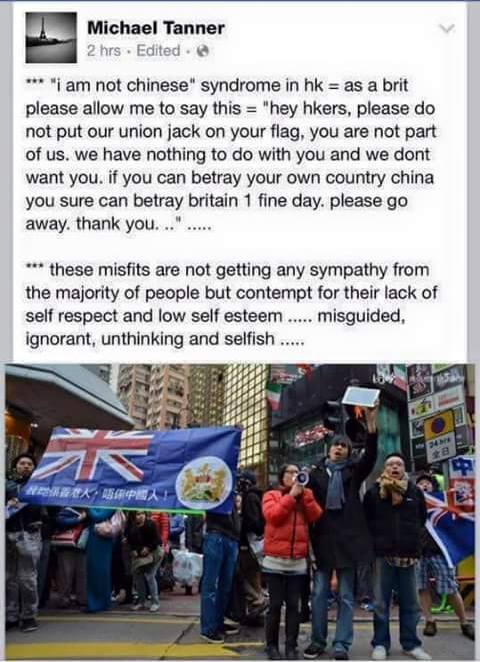
Internet comments:
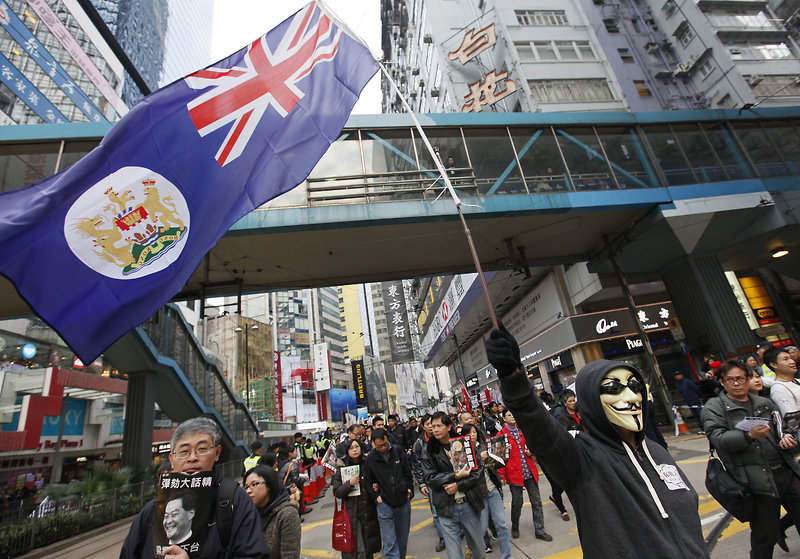
- Golden saying: "If you can
betray your own country China, you surely can betray Great Britain one fine day.
Please go away. Thank you." Here is my nomination for the new Hong Kong
City-State national anthem: O,
Perfidia!
- Not so much about the logical inference on treason, but it is the part about
"Please go away. Thank you." The Brits are just so polite (=cruel irony).
- Diamond saying: "Lack of
self-respect and low self-esteem." Please see
Hong Kong vs. Bhutan. The answer to the question: What kind of people
boo their own national anthem and feel great about it?
- The independence movement was
forced into existence. On one hand, these people insist that they are not
Chinese. On the other hand, the British want nothing to do with them. So they
have no choice except to found a new free and independent Hong Kong City-State.
- So you mean to say that Michael Tanner is actually giving a push to the Hong
Kong independence movement?
- I totally understand what you saying. On one hand, they could be Chinese
humans. On the other hand, they couldn't become British poodles. So they have
no choice except to become Hong Kong pigs.
- It is clear that Michael Tanner
is a fictional character created by Chinese Communist propagandists. True Brits
love freedom, democracy, human rights, universal suffrage and rule of law (but
not civil nomination). After all, the Brits led
by their great leader Tony Blair brought freedom and democracy to
Afghanistan,
Iraq and
Libya. Look how happy the
Afghans,
Iraqis and
Libyans are with their newfound freedom and
democracy. Soon the Brits will bring freedom and democracy to
Syria and then
Iran.
- But the Brits won't pip a squeak about
Bahrain
and
Saudi Arabia?
- Michael Tanner is very real -- see his comments at
The
Guardian.
- Michael Tanner is actually
saying what plenty of Hongkongers are very perplexed by. Okay, so a group of
people want to become an independent nation. We understand that. We have seen
America, India, Pakistan, Mexico, Venezuela and so on go through the process.
But we have never seen anywhere in history any such nation taking the path of
wanting a return to its former colonial master who will then give permission to
become independent.
- Hong Kong independence mantra:
Oh beloved Great Britain, we were, are and will always be part of you!
Do not
forsake me, my darling!
- Chinese Colonists GET OUT!
(because we prefer the British colonists instead)
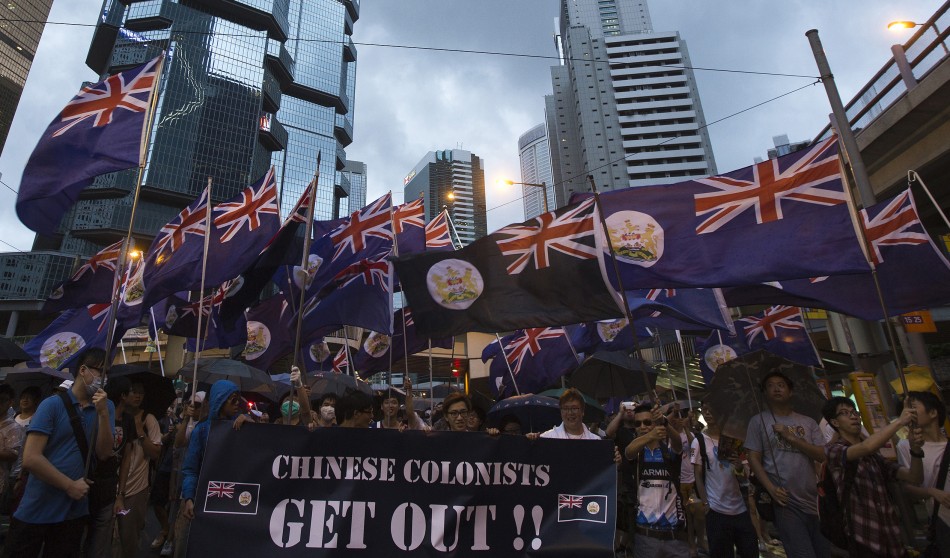
- A Concise History of Hong
Kong (2007) by John M. Carroll.
Despite their status and wealth,
the members of the Chinese bourgeoisie, like all Chinese in Hong Kong, continued
to face racial discrimination in every turn. Racial segregation was enforced
both legally and informally. In 1901 a group of Europeans petitioned the
colonial government for a separate school for Europeans, arguing that integrated
education harmed the morality and character of European children. Although one
Chinese resident complained to the local press that "to exclude from certain
schools means to go against the law of nature and to aggravate the hatred
between Chinese and foreigner" and Secretary for the Colonies Chamberlain
condemned the proposal, it enjoyed great support among European parents and the
colonial government ... Chinese were barred from the Hong Kong Club and the Hong
Kong Jockey Club, and in some hotels Chinese guests could stay only in certain
rooms or could not stay overnight.
A particular example of this
government-enforced racial divide was Victoria Peak, the exclusive hill district
on Hong Kong Island where no Chinese, except for the servants, cooks, houseboys,
and drivers working for Europeans, were to live. In 1902 this residential
segregation became law when the Colonial Office allowed the Peak to be used
solely by residents approved by the governor. Subsequent ordinances passed in
1904 and 1918 explicitly barred Chinese and Eurasians from living on the Peak.
As in India and other British colonies, Europeans in Hong Kong worried that
close contact with Chinese posed serious physiological and moral risks. Most
Europeans in Hong Kong believed that the fate of the colony depended on the
health of its European population. Amid the fears of increased contact with
Chinese and rising economic competition from the Chinese bourgeoisie, these
restriction movements were attempts to preserve the status and social structure
of the elite European community of Hong Kong.
- Why do I call you a bastard?
Your paternal grandfather is Chinese.
Your paternal grandmother is Chinese.
Your maternal grandfather is Chinese.
Your maternal grandmother is Chinese.
Your father is Chinese.
Your mother is Chinese.
But you insist that you are not Chinese.
Therefore you are a bastard.
Quod erat demonstrandum/ὅπερ ἔδει δεῖξαι.
- 'Tis time to switch flags.
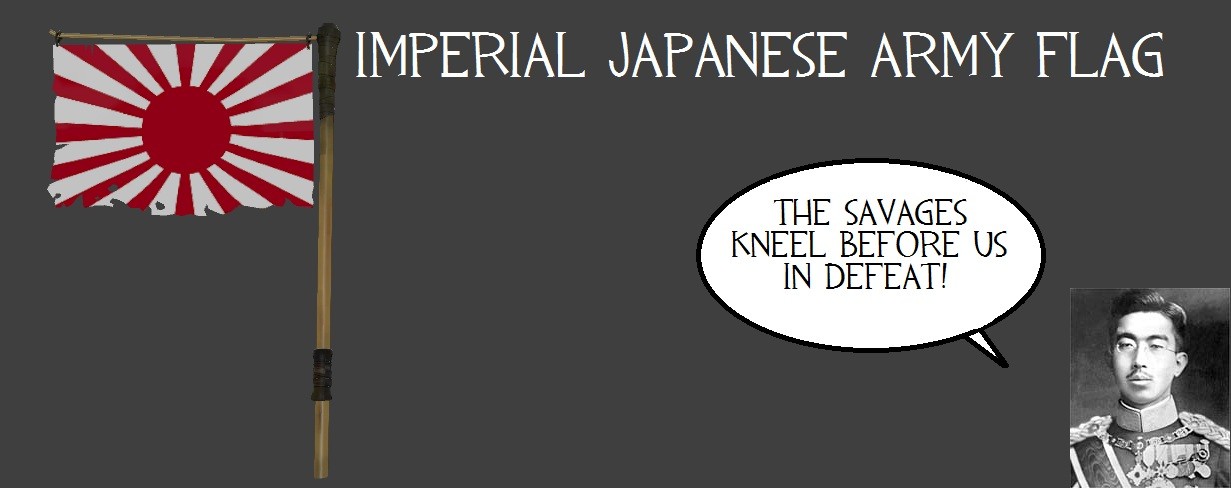
- More sayings of Michael
Tanner
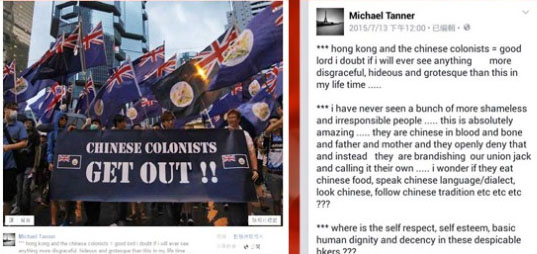
- Michael Tanner
challenges all pro-independence Hongkongers to take this
UK Citizenship test. You must be correct at least 75% (18 or more out of
24 questions) to pass.
- Cartoon: Wishful thinking:
"Motherland!" "I remember the colonial days so fondly" ... "If you can betray
your own race, you will surely betray us one day if we take you in!"
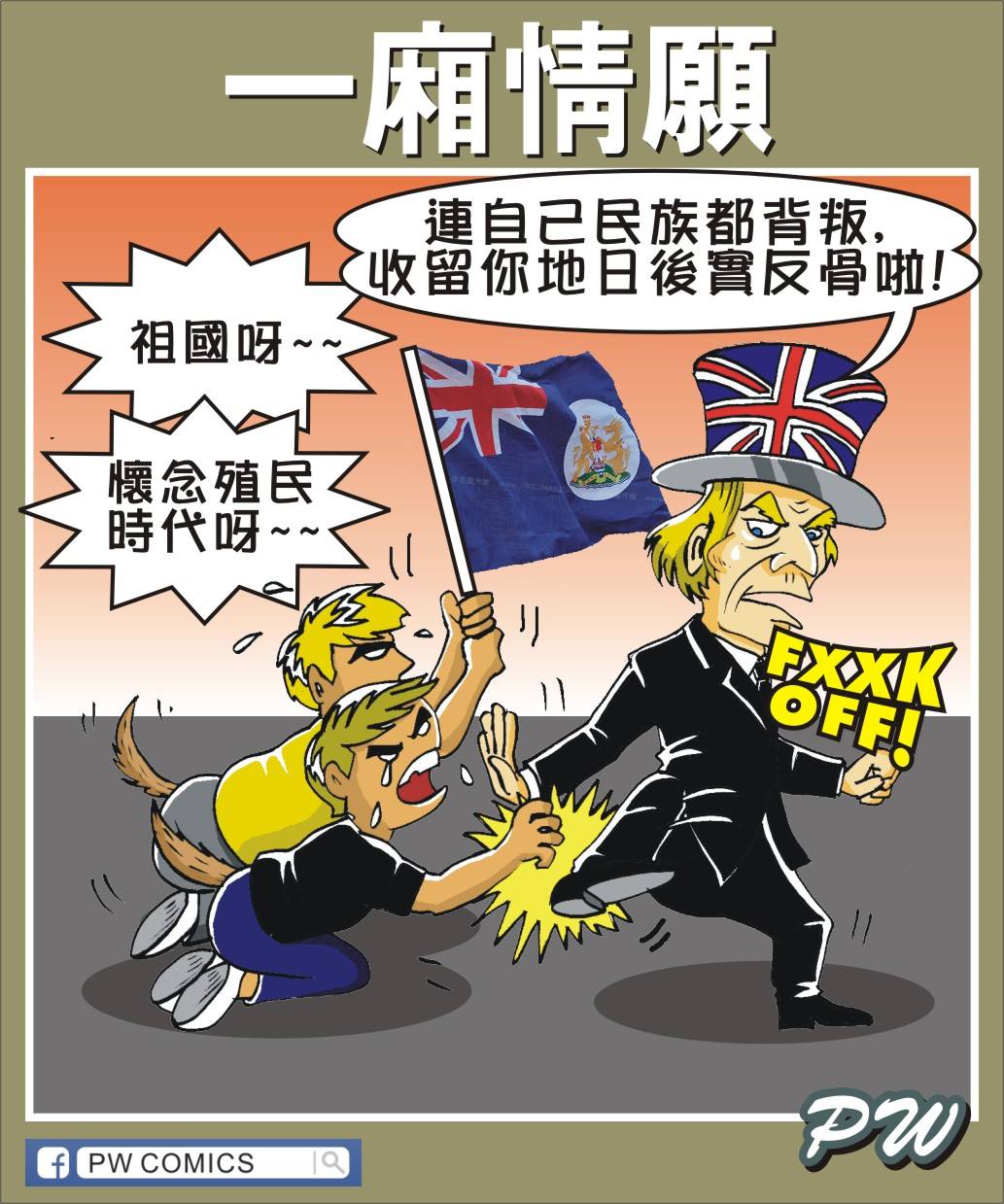
(Wen
Wei Po) The Hong Kong Guangdong Community Association commissioned the
Hong Kong Research Association to interview 1,269 citizens on June 10-14
Q1. Do you think that the Legislative
Council should pass the Chief Executive election proposal?
64.1%: Yes
27.5%: No
5.2%: Hard to say
3.2%: No opinion
Q2. How confident are you that the
Legislative Council will pass the proposal?
17.7%: Confident
62.2%: Not confident
16.9%: Hard to say
3.2%: No opinion
Q3. If the Legislative Council
fails to pass the proposal, will you vote again for those Legislative Councilors
who voted NO this time?
20.8%: Yes
60.3%: No
(Wen
Wei Po) Hong Kong Island Federation interviewed 3,557 citizens from
mid-May to June 11.
Q1. Do you agree that the election
of the Chief Executive should follow the Basic Law and the August 31st
resolution of the National People's Congress Standing Committee?
71.0%: Agree
23.4%: Disagree
5.6%: Neither agree nor disagree/no opinion
Q2. Do you want to have
one-person-one-vote?
93.3%: Yes
3.0%: No
3.7%: Neither/no opinion
Q3. Do you think constitutional
reform should proceed gradually rather than remain in the same place?
70.3%: Yes
18.7%: No
11.0%: Neither/no opinion
Q4. If the government's proposal
is vetoed and citizens won't have one-person-one-vote, then those legislators
who voted NO should be held responsible.
67.2% Yes
20.3%: No
12.5%: Neither/no opinion
(HKG
Pao) Silent Majority HK commissioned the Hong Kong Public Opinion
Research Centre to interview 901 adult Hong Kong citizens by telephone on June
8-11.
Q1. Do you think that the
Legislative Council should pass/veto the constitutional reform proposal
according to majority opinion?
83%: Yes
11%: No
Q2. Do you think the Legislative
Council should pass or veto the proposal?
60%: Yes, so that there is one-person-one-vote in 2017
33%: No, so that the 1200-person election committee will continue as is
Q3. Should the pan-democrats vote
together according to their previous agreement?
29%: Yes
60%: No, they should vote according to their own wishes now
Q4. If the constitutional reform
is vetoed now, when will the five-step reform process occur again?
11%: Before 2017 (during CY Leung's term)
35%: 2017-2022 (during the term of the next Chief Executive)
33%: After 2022
Q5. Will you vote for any candidate
who vetoed the constitutional reform proposal this time?
35%: Yes
50%: No
(TVB)
TVB commissioned the Lingnan University Public Governance Programme to interview
1,115 adult Hong Kong permanent residents on June 9-12.
Q1. Do you think that the
Legislative Council should pass or veto the government's constitutional reform
proposal?
46.7%: Yes
44.8%: No
8.2%: Don't know
Q2. Do you accept the
constitutional reform proposal?
34.6%: Yes
43.9%: No
18.8%: Half-half
Q3. If the constitutional reform
fails to pass, who is responsible? (Multiple choices allowed)
42.8%: The HKSAR government
36.7%: The central government
18.0%: The pro-establishment camp
39.2%: The pro-democracy camp
Q4a. Would you vote for a
legislator who vote against the proposal? (Among those who want the proposal to
pass)
25%: Yes
75%: No
Q4b. Would you vote for a
legislator who voted for the proposal? (Among those who don't want the proposal
to pass)
19%: Yes
81%: No
(SCMP)
Surveys reveal only one thing - the public is evenly split on 2017 political
reform. June 16, 2015.
The local government began the reform
process vowing to win over the public. The use of polling was to be its key
strategy to convince sceptics, but it has found itself confronting divisive
and sometimes disappointing results.
According to the rolling poll by three
universities, opposition and support for the proposal has been neck and
neck, although in the University of Hong Kong's latest survey released
yesterday, 51 per cent of people called for Legco to approve the bill.
Still, few expect any of the 70 lawmakers
to base their final decision on such public sentiment.
First, public sentiment seems to matter
less than the convictions of the lawmakers, analysts say. As one
pro-democracy lawmaker said on condition of anonymity: "Even if the
universities' poll say there's more support than disapproval, we can't vote
yes - that's not in line with what we have been asking for all along."
Second, the poll results at the core
reflect the status quo of a deeply divided society. Even most polls
commissioned by Beijing loyalists show at best a support rate of 60 per
cent. After factoring in the margin of error and the response rate, the
level of support is unremarkable.
But these findings also differ from the
latest releases by the tri-university polls - regarded as one of the most
authoritative - which show that opposition had briefly overtaken support,
reaching what the pan-democratic lawmakers cheerfully describe as a "golden
crossing". Some 43.4 per cent said they did not back the proposal, compared
with 41.6 per cent supporting it, in the poll conducted between June 4 and
June 8 by HKU, Chinese University and Polytechnic University. However, the
level of support again surpassed opposition in the most updated figure,
released on a daily basis.
On Friday, Chief Executive Leung Chun-ying
raised eyebrows when he responded to the findings by saying one should pay
attention to whether the pollsters exhibited "strong political inclination"
and how professional they had been. He added that the public should compare
different polls as questions were asked differently.
A day later, he found at least one survey
useful. He drew the media's attention to an HKU poll in collaboration with
RTHK which found that 50 per cent of respondents said Legco should pass the
reforms, against 33 per cent who said otherwise.
Like Leung, pro-establishment politicians
argue there is a difference between asking whether one approves of the
proposal and whether Legco should pass it.
The latest HKU poll - funded and
commissioned by Liberal Party lawmaker James Tien Pei-chun with a "supersize"
pool of respondents of 5,000 plus - covers both. Forty-eight per cent
supported the proposal, while 38 per cent opposed it. When asked which
button lawmakers should press, 51 per cent supported Legco passing the bill,
against 37 per cent who disapproved.
The latter finding is in line with previous
surveys conducted by pro-establishment groups that asked whether Legco
should approve it: there would be more support than opposition with a
support rate of above 50 per cent.
Take a mid-May poll conducted by the Hong
Kong Policy Research Institute commissioned by the Democratic Alliance for
the Betterment and Progress of Hong Kong, the Beijing-loyalist party with
the most lawmakers. Some 61.9 per cent of 1,070 respondents chose the first
option, against 32 per cent who opted for the second.
But the way the questions were drafted was
a "classic example of leading questions", said Dr Fu King-wa, an expert in
statistical journalism at HKU. In the poll, the DAB asked respondents: "Do
you think the Legislative Council should: (1) pass the proposal, in order to
allow universal suffrage of the chief executive by one person one vote, or
(2) vote down the proposal, at the expense of the political system stepping
on the same ground in 2017?" Fu says: "It is too negative to include such
terms as 'at the expense of' and 'stepping on the same ground' for a
professional poll."
In a poll by the New People's Party in
April and May, 51.3 per cent supported the proposal. The poll was conducted
on the street by the party itself - a party with only two Legco seats. Fu
says the problem with a poll like this is the willingness of passers-by who
do not support the party to be surveyed. Party chairwoman Regina Ip Lau
Suk-yee admitted the poll was not "weighted" and not citywide. "Poll
findings are a matter of trust at the end of the day," Ip said as she
unveiled her findings. Fu stressed the importance of "weighting" a poll, a
technique to adjust answers to account for over- and underrepresented groups
according to census statistics.
Also on the pro-Beijing side, a more
consistent monthly poll conducted by the Hong Kong Research Association
found 60 per cent support for Legco to pass the plan over time. In its
conclusion for the latest release yesterday, the association, a favourite
pollster of pro-Beijing groups and parties, does not hide its political
inclination and "appeals to pan-democratic lawmakers to … consider
supporting the proposal".
Professor Ma Ngok, a political scientist at
Chinese University, says the joint-universities poll is the only credible,
non-commercial one and if lawmakers were to make a decision based on a poll,
this ought to be it. "Without a majority support, a government cannot claim
that it is a reasonable policy," Ma says.
After the vote, all eyes will be on whether
the pan-democrats will suffer in the District Council elections this year
and the Legco election next should they vote down the proposal and, in a
way, disenfranchise the public. But Ma doubts this will happen, given such
an evenly divided public. "The original plan for the government was to blame
the pan-democrats. I'd say that no longer works," Ma says.
(The
Standard) June 16, 2015.
A local radical
group advocating independence for the SAR is allegedly involved in the
bombing plot. At least one of the nine arrested over the plot admitted to
being from the National Independent Party.
The suspect is apparently a key member of
the group, whose Facebook page was set up in January. The page was deleted
last night, but archived webpage records show that in a post on June 1, the
group, in poor English, stated: "Warning: If the constitutional reform package
is passed on
June 17, then Hongkongers must be prepared that there would be casualties on that
day. Legislative Council will be another ruin as in Ukraine."
In another post on January 19, the group
compared the independence movements in Hong Kong and Taiwan. The banner of
the group said "Liberty, not communism, is the most contagious force in the
world."
The group's stance was detailed in another
post on May 13. "We are devoted to combining the pro-independence groups in
Taiwan and Hong Kong into a cross-territory force," it stated.
The group supports localism groups HK
Indigenous and Civic Passion. It also saluted Undergrad, a University of
Hong Kong student union publication criticized by Chief Executive Leung
Chun-ying in his policy address for "advocating independence."
Members of the group joined anti- parallel
trading protests, and planned to oppose construction of the third airport
runway, and the passing of the political reform proposal "using any means," it
stated.
The group had 219 "likes" before yesterday.
It surged to 335 "likes" before the page was closed down.
A former construction worker, Cheng
Wai-shing, was one of the people arrested in the alleged bombing conspiracy.
Cheng. 29, was arrested after participating in anti-parallel trading
protests in Yuen Long. He was banned from going there. After being injured
in a traffic accident, he became a cleaner.
Cheng allegedly owns a motorcycle found
outside the ATV studio in Ho Chung. He also owns a private car and a lorry.
His social media account says he is enthusiastic about social movements,
likes riding motorbikes and plays war games. He has uploaded several
pictures of himself holding long guns.
Another suspect is a 20-year-old Eurasian
who lives in Costa Bello in Hong Kin Road with his family: his businessman
father, his mother and younger brother. It is understood he just returned
from studying overseas a month ago.
(Cable
TV) June 15, 2015.
According to information, some of
the arrestees admitted that they were members of the National Independent Party.
The police have been paying attention to this organization for over a month. On
June 1st, the website of the National Independent Party contained a warning that
if the constitutional reform proposal is passed by the Legislative Council on
June 17th, then "the people of Hong Kong should be psychologically prepared to
suffer casualties that day" and "the Legislative Council will become another
Ukrainian ruin."
The National Independent Party
website also contains videos of demonstrations in other countries, saying that
"these are the resistance standards" and "our warriors should be prepared at all
times."
The National Independent Party say
that they never boast about their accomplishments or fame, and they will
continue to stay invisible while conducting revolutionary activities. They said
that they were present in the various anti-parallel trader actions and they got
"results." Their next targets will be the Third Runway at the Hong Kong
International Airport and the June constitutional reform. They will do
everything possible to stop these things.
The National Independent Party say
that buying new weaponry will stop the demonstrators, because the authorities
will become BBQ meat just like elsewhere in the world.
The National Independent Party
Facebook was established in January this year. So far more than 200 people have
given Likes. In May, the National Independent Party announced that they will
work towards joining the Hong Kong and Taiwan independence movements to form a
new independence force.
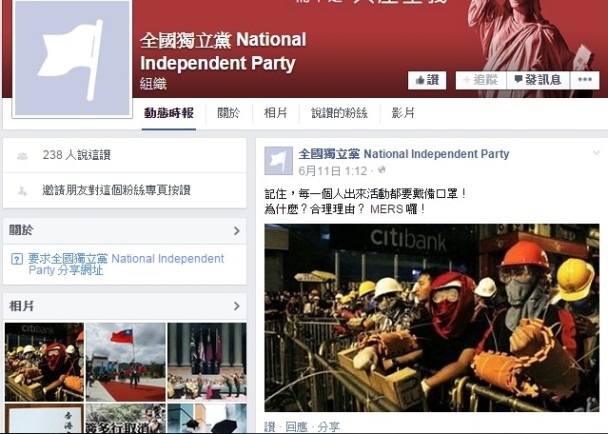
Last update on June 11: Remember everyone who
comes out to act should wear surgical masks! Why? What is the reasonable excuse?
MERS!
(Oriental
Daily) June 16, 2015.
List of suspects
1: Cheng, male, 29-years-old, construction worker
2: Chan, male, 34-years-old, unemployed
3: Pennelli, male, 22-year-old, technician
4: Man, male, 23-year-old, unemployed
5: Woo, male, 21-years-old, unemployed
6: Chan, female 29-years-old, purchasing agent
7: Hui, female, 21-years-old, Open University student
8: Woo, female, 30-years-old, Jockey Club EduYoung College teacher
9: Fung, female, 25-years-old, client service representative
10: Chan, 58-year-old, businessman (father of female Chan and arrested at Lo Wu
border control point)
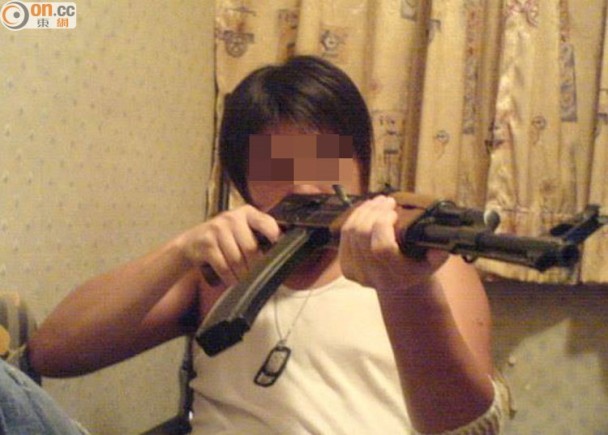
Suspect Cheng, also known as "Hong Kong bin Laden"
(Apple
Daily) June 15, 2015.
Cheng and Chan are the core
members of the National Independent Party. They were arrested during the Occupy
Yuen Long demonstration for carrying a box cutter and a switchblade
respectively, as well as using chili oil spray. The two are out on bail while
the investigation continues.
Cheng is known to friends as the
"Hong Kong bin Laden" and he lives in a Sheung Shui villa with his girlfriend
Woo. He used to be a construction worker but hasn't work due to a leg injury
sustained from an auto accident. Cheng loves to play music and war games. On
June 11, he posted a photo of himself holding an AK47.
Chan graduated from Polytechnic
University and he loves model guns. He has posted war games photos of himself
and friends. He claimed to have been in the French Foreign Legion. In 2010, Chan
was found guilty of possession of explosive materials and sentenced to 240 hours
of community service.
Rizzy Pennelli lives with his Italian
father, his Chinese mother and a younger brother in Sai Kung's Costa Bello. He
graduated from university in England last year. He participated in the Umbrella
Movement, and was pushed to the ground by the police during the Mong Kok
clearance. On his Facebook, he said that he cares about democracy, but he does
not agree with a completely peaceful resistance.
(Oriental
Daily) March 3, 2015.
33-year-old unemployed man Chan
and 29-year-old construction worker Cheng were arrested with 19-year-old student
Kwan. The three of them were found carrying a switchblade, a box cutter, a 30cm
long rubber truncheon, a lighter and several homemade chili oil sprayers. The
police searched Chan's home and found three homemade police batons (including
electrical wires).
Muscular Cheng also supports the
Occupy Movement. His Facebook icon is a yellow ribbon. According to information,
Cheng is a fan of guns and motorcycles. He has a photo of himself on a
motorcycle as the front page of his Facebook. He is a member of motorcycle
Facebook groups and frequently go riding with friends. He adores
Jerry
Miculek, the Greatest Shooter of All Time. He is known to his friends as
"the Hong Kong version of bin Laden" and "the King of Robbers."
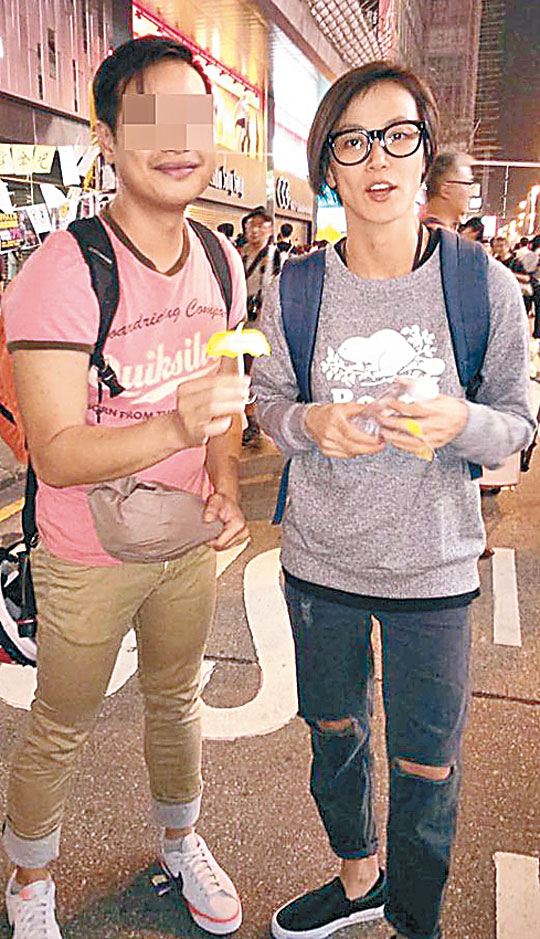
Chan with singer Denise Ho
According to information, Chan
graduated from Polytechnic University and has worked as a lifeguard and a
swimming coach. He loves model guns. On his Facebook, he posted photos of
himself and friends in war games. Chan supports Occupy Movement, and his
Facebook icon is the Shopping Revolution. He has worked as an emergency aid
worker at the Occupy Mong Kok zone. He has a photo of himself wearing an
emergency worker uniform, together with helmet and goggles. He said that this
was the ultimate equipment for an equipment freak.
In 2010, Chan was convicted of
possessing restricted explosives and sentenced to 240 hours of community
service. Chan who had served in the French Foreign Legion did not have the
opportunity to use his fluent French in court. The magistrate said that Chan
made him "very uneasy because it was hard to render a verdict." In that case,
Chan converted a smoke bomb into a rocket and tested in a Mong Kok back lane in
June 2009. He was arrested by police patrolmen. In his apartment, the police
found materials related to rockets. Chan said that he wanted to test the
theories on rockets and therefore he manufactured a rocket "for fun."
(Oriental
Daily) May 26, 2016.
The magistrate found defendants Chan
and Cheng guilty of possession of weapons of assault. The magistrate found that
two defendants' explanation not to be credible.
Chan said that he was there to
render emergency aid, but his chest armor was not consistent with that role.
Chan also said that the five bottles of chili oil was given to him by a relative
in mainland China but he did not know where they came from.
Cheng said that a friend gave him
the chili oil. However, he was unable to find the friend to testify on his
behalf. Cheng also claimed to have consumed the chili oil before, but he could
not explain how.
The magistrate said that the lab
analyst determined that the chili oil was not fit for human consumption. Like
pepper spray, it can cause discomfort to the eyes upon contact. Therefore the
magistrate determined that the two defendants brought the chili oil spray
bottles in order to attack people.
(Oriental
Daily) March 17, 2017.
After serving nine months in
prison, Chan Yiu-shing is appealing his conviction and sentence. After serving
six months in prison, Cheng Wai-shing is appealing his conviction.
Chan's lawyer said that the
magistrate erred in not accepting Chan's explanation that he was there to offer
voluntary emergency rescue. The magistrate ignored the possibility taht Chan
wore a protective armor helmet to protect himself as opposed to joining violent
clashes. When Chan got to the scene, he may just turn around and leave, or stand
aside and watch. The lawyer also said that the magistrate was ambivalent about
the potency of the chili oil spray, by saying that it was of low density at one
point and then as potent as pepper oil spray at another point.
Cheng's lawyer said that the chili
oil spray can be consumed and the prosecutor failed to disprove the contention
that the defendant intended to apply the chili oil spray on his food.
The High Court judge questioned
whether any person who apply the chili oil spray inside the mouth. The expert
testimony was that this spray can cause discomfort in people. "When you use
chili sauce to attack someone, it is considered a weapon. There is no way that
you can argue that it cannot be a weapon of attack because it is edible."
(SCMP)
March 17 2017.
Two Hongkongers found carrying chilli spray at a 2015 protest
sought to overturn their weapons conviction on Friday, arguing that they did
not intend to take part in a non-peaceful demonstration.
Chan Yiu-shing, 35, was found guilty of possessing an
offensive weapon and sentenced to nine months jail in May last year after
police intercepted him carrying five bottles of chilli spray and wearing
protective “BMX gear” at the protest in Yuen Long on March 1, 2015.
His co-defendant Cheng Wai-shing, 31, was sentenced to six
months jail for possessing one bottle of the chilli spray during the same
protest.
Protests emerged in the New Territories in 2015 with
Hongkongers voicing their discontent towards mainland parallel goods
traders. Locals said the traders had swamped their neighbourhoods, caused
congestion and a shortage of goods.
During Chan and Cheng’s trial in May 2016, a magistrate ruled
that the protective gear worn by Chan was “a clear sign that it was not for
a peaceful protest” and the chilli spray was an offensive weapon. At the
time, the pair argued that the spray was intended for consumption.
Having now completed their jail time, the pair took to the
High Court on Friday to appeal against their conviction and sentences.
Their lawyers argued that being dressed in protective gear
and carrying multiple bottles of chilli spray did not mean that they
intended to take part in a non-peaceful protest.
Chan’s defence lawyer, Alexander Cheung Hok-fung, said the
convicting magistrate jumped steps to reach his conclusion. “The magistrate
said the gear was for protective reasons, which we accepted,” Cheung
recalled of the May 2016 trial.
He said the magistrate then, however, concluded that the
protective gear proved Chan was not there to take part in a peaceful protest
and the spray was therefore an offensive weapon. “There had to be other
evidence before such an inference can be drawn,” he told High Court judge Mr
Justice Albert Wong Sung-hau.
Cheung argued that Chan’s gear was for his own protection as
there was a commotion on the day. He said Chan might also have been leaving
the protest when police intercepted him, therefore suggesting that he would
not have used the spray on others.
Defence lawyer for Cheng, Randy Shek Shu-ming, contested the
magistrate’s decision to deem one bottle of chilli spray as an offensive
weapon.
Mr Justice Wong is expected to hand down his judgment at a
later date.
(SCMP)
Hong Kong bomb plot a conspiracy to smear us, localists claim, ahead of reform
vote. June 16, 2015.
Hong Kong localists have distanced
themselves from radicals arrested for an alleged bomb plot, as they raised
claims that the plan was a conspiracy to smear them before the Legislative
Council votes on the government’s electoral reform package.
Jon Ho, spokesman for Hong Kong Localism
Power, told a Commercial Radio programme today his group had no connection
to 10 members of the “National Independent Party” arrested for allegedly
plotting to set off bombs to cause mayhem and bloodshed. Ho also questioned
if the party was a genuine localist group, citing suspicious features of
material belonging to the group seized by police officers. “Localist groups
would not mention umbrellas and yellow ribbons,” Ho said, referring to items
carrying logos of the key icons of last year’s Occupy movement.
Some paraphernalia also carried the name of
the League of Social Democrats. Ho said that it was “impossible” to link
League of Social Democrats lawmaker “Long Hair” Leung Kwok-hung to localist
groups as he insisted he was Chinese – a standpoint that was entirely
different from that of localists. Some localists said online they had never
heard of the group and knew no one in it. Hong Kong Indigenous spokesman Ray
Wong Toi-yeung said: “I’ve never heard of them. Absolutely not.”
Meanwhile, a Facebook user raised several
points of suspicion, based on observations of the evidence police showed to
the press. The user found a slogan that read: “Kick out the snake
feasts-vegetarian feasts-rice dumplings-cakes,” on some seized leaflets
shown by police. The items are usually used to refer to pro-establishment
political groups, as they were known to offer them as gifts to draw support.
But the user said: “Why did rice dumplings come before cakes [in the
slogan]? Hongkongers would not make mistakes like this,” referring to the
more common sequence of “snake feasts, vegetarian feasts, cakes and rice
dumplings.”
Another Facebook user said: “A [real]
localist group would definitely not describe themselves as ‘national.’”,
while another said: “Which nation are you talking about? Why does a nation
need to be independent when it’s already a nation?”
(memehk)
Stephen Siu. June 16, 2015.
There are four possibilities about these
National Independent Party guys.
Possibility #1: They were framed. They never
did anything like this, but the police planted the evidence. These people are
innocent valiant warriors. They went to the ATV studio to chat, but the police
planted the explosives, guns and banners. I think this is impossible to do in
Hong Kong. If these people suddenly come up with proof that they could not
have been at the scene, etc, it would be a major disaster for the police. It
is one thing to frame one person, but framing ten persons at the same time is
almost impossible to carry out.
Possibility #2: The police directed the whole
operation. These ten people are mercenaries hired by the police to do this. If
so, what is the purpose? It would be to smear. But to smear whom? The
pan-democrats have disavowed them already. Therefore they will be smearing the Localist movement. But nobody in the Localist movement has heard of them. So
who are they smearing?
Many commentators are opting for this
possibility. I consider this to be preposterous. Among these ten individuals,
several of them have been active for a long time. There was a couple who were
arrested in Yuen Long. Another one is a Student Frontier member working
alongside Cheng Kam-mun. If they are really police informants, they would be
undercover for a long period of time gathering information on big-shots such
as Raymond Wong, Wong Yeung-tat, Wan Chin, etc. Now that they are arrested,
they can only testify against each other and then they will be sentenced to 10
years or more in prison. In The Godfather, a famous saying was that they won't
touch heroin because the jail term is long and "people would break and
start to talk." This is a stupid plan. How can anyone believe these arrestees
are police informants? If the police does this, they only need two to three
informants and they want to be able to have the evidence to convict all of the Localist leaders.
Possibility #3: The police have informers
around them, but the informers are not among the ten arrestees. The informers
knew what they were up to, and they may have even incited them to do these
things. Such an informer will come into suspicion from the arrestees because
he wasn't arrested too. This informer will show up as a witness for the
prosecution and then his identity will be concealed.
Possibility #4: Ever since the Umbrella
Movement, all the radical elements are under police surveillance. These people
came to the notice of the police earlier, and the police have been following
them for the past three months. The arrests were made after they tested the
bombs. This is the most likely scenario. Some people are saying that they
detect flaws, such as the choice of terms that appear to be non-Localist. That is
risible. Do you have to take the SAT test and demonstrate proper Chinese-language usage in
order to qualify to be a Localist? These are stupid people and there is no limit as to
how stupid they can be. When they get their day in court, the Internet will
find out all about them. Then we will know whether they are police
informants or not.
(Oriental
Daily) June 16, 2015.
There is a new statement that supposedly comes
from the National Independent Party. It says that the nine arrestees are
members of their organization, which has suffered an unprecedented blow.
However, "the revolution will not stop." The NIP acknowledges that that
their members used TATP to make bombs in order "to achieve the greatest
effect with the least amount of resources." The goal is to charge at the
Legislative Council during the debate/vote on the constitutional reform
proposal.
The statement also says that the National
Independent Party wants to achieve independence for Hong Kong, which is a
nation capable of being independent. They also criticized other localist
parties for immediately disavowing the National Independent Party or not
even acknowledging that it exists. They said that some of their members are
also members of other localists organizations with whom they have previously
exchanged intelligence.
(Bastille
Post) June 16, 2015.
A Facebook user named Yim Tat-ming claimed
that the National Independent Party's Facebook page was posted from the IP
address of the One Country Two Systems Research Centre which is led by
Executive Council member Cheung Chi-kong. This became proof that the whole
thing must be a false flag operation.

Once the media started calling, the One
Country Two Systems Research Centre asked their technical support to verify
that this was not true. Shortly afterwards Yim Tat-ming: "The post on source
of the National Independent Party has been deleted, including from my status
this morning. I apologize for any convenience caused by the rumor." According to
information, the One Country Two Systems Research Centre has filed a police
report.
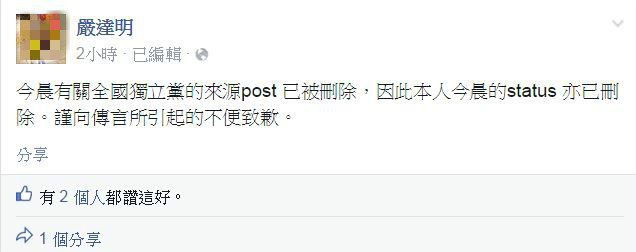
(EJinsight)
National Independent Party: Terror group or political bogeyman? By SC
Yeung. June 16,
2015.
News
that police seized explosives and arrested members of a shadowy group
following a raid on an abandoned building in Sai Kung certainly perked
things up at the start of the week. The suspects were described as members
of a political group called National Independent Party, whose goal, as the
name implies, is to gain independence for Hong Kong.
It is
supposedly a radical group who will not hesitate to employ violence to
achieve its ends. In fact, police said they seized from the group maps
showing the locations of Admiralty and Wan Chai as well as a dynamite depot
in Ma On Shan. They were allegedly plotting to sow terror and chaos in the
city as the Legislative Council deliberates and votes on the government’s
political reform proposal this week.
This
is indeed unsettling. Not since police officers manhandled unarmed activists
and attacked them with tear gas and pepper spray in last year’s Occupy
protests has violence figured in recent political activities.
But
what is worrisome is that the authorities have branded this group as a “localist”,
thereby lumping it together with other activist groups which have no
intention of employing violence in their pursuit of genuine autonomy for
Hong Kong.
In
fact, none of the pro-democracy groups knew about the National Independent
Party until it was divulged by the authorities. A check with its Facebook
fan page showed that it has around 120 “likes” since the account was opened
in January.
After
the raid on the former ATV studio on Ho Chung Road, police officials held an
on-site press conference to elaborate on the nature of the group, based on
the evidence they have gathered.
Police
said they found leaflets saying “Chun Ying, go to hell” and “Black police
die with their families”. These slogans are quite strange for members of
localist political groups. In the first place, they never call Chief
Executive Leung Chun-ying by his first name. They just call him “689″, which
refers to the number of votes he got from the election committee to win the
post in 2012. As far as we know, only pro-Beijing publications such as Sing
Tao Daily call him Chun-ying in their news reports.
Another bizarre word found in the group’s leaflets is “reunification” to
describe the city’s return to Chinese rule in 1997. This is a word used by
authorities in Beijing, not by known radical political groups in Hong Kong.
Another leaflet found on the site says: “Please vote for Umbrella Localists.”
Now, localist groups have distanced themselves from the Umbrella Movement as
early as the first few weeks of the protests since they believe the campaign
won’t achieve anything. They certainly don’t want to be described as
“Umbrella Localists”. In fact, the name of the group — National Independent
Party — does not reflect the goal of genuine localist groups.
Localist groups want to focus their struggle on achieving genuine autonomy
for Hong Kong. This means they want to reduce the importance of China in the
city’s political, social and cultural life. They want Hong Kong to have its
unique status, instead of being a mere administrative region of China.
As to
be expected, pro-democracy groups immediately clarified that they had
nothing to do with the National Independent Party or its officers and
members, or with its alleged plans to attack Legco later this week.
Hong
Kong Localism Power and People Power stressed that they do not condone
violence. “Police said localist activists are making bombs, but I am not
sure if it’s real or not,” Jon Ho of Hong Kong Localism Power was quoted as
saying. “We have nothing to do with that.” People Power’s Tam Tak-chi added:
“People Power did not do that. Our group does not believe in violence.”
So who
are the people behind the National Independent Party? It is becoming clear
that this shadowy group is besmirching the image of localist political
groups. It is being used to portray “localists” as violent groups that
intend to sow chaos and disorder in the city to pursue their agenda.
And
who would benefit if localist activists are portrayed as violent radicals?
Certainly not the localists and other pro-democracy activists, certainly not
their cause of achieving genuine universal suffrage and true autonomy for
Hong Kong. It’s the enemies of pro-democracy groups that will gain from this
atmosphere of fear and suspicion that is being created in the city.
As
Legco prepares to vote for the government’s political reform package, we
hope everyone will maintain sobriety and allow reason to prevail in the
deliberations. But if violence breaks out outside the Legco complex, the
authorities can easily put the blame on the localists and pan-democrats
— thanks to the National Independent Party.
(Apple
Daily) June 17, 2015.
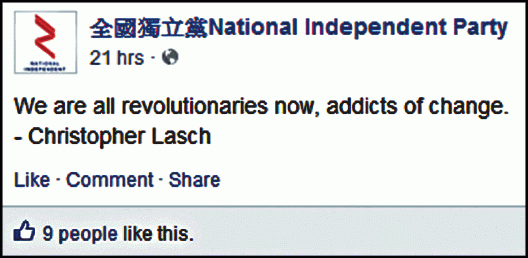
An editor of the National Independent Party
Facebook group contacted our reporter and told us that the party "exists only
in name" with loose organization. He said that he saw a network security
discussion at the Hong Kong Golden Forum and joined. "At the time, the name
was something like China-Hong Kong-Taiwan Chinese People Democracy Discussion
Group. Someone complained that the name was too long, so it was changed to
National Independent Party."
He guessed that someone in the group went and
formed their own action group. "Sometimes the page is updated without my
knowledge." He said that he has never met with any other member. Most of the
photos are of Taiwanese girls or umbrella designs. "There is no evidence that
the arrestees are party members." He said that there may be some police
informers in there. "We screen, but all you have to do is state your political
beliefs and send a photo of your ID. How can you screen out someone who
intends to become a mole?"
He said that he has never seen the pamphlets
that the police exhibited. "The worse part is that they don't know their
history because they think that the million person march came after the June
4th massacre."
As an editor, he said: "I have thought about
the police coming to search my home. But I have nothing there. There is
nothing that they can hold me to ... I was nervous for a while, because I had
to decide whether to delete all my adult videos."
Internet comments:
- The National Independent Party?
Our normal understanding is that some region of a nation wants to become
independent. For example, Scotland from the United Kingdom; Catalunya from
Spain. But what is a National Independent Party? Does mean that the whole
nation wants to be independent of the whole nation?
- If you go to
Free Dictionary and type in "National Independence", you are re-directed
to "Self-determination" which means (1) determination of one's own fate or
course of action without compulsion; free will; (2) Freedom of the people of a
given area to determine their own political status; independence.
- Most of the 238 National
Independent Party Facebook
followers are said to be political news reporters, who wanted to have access in
the event that something happens. They have had the chance, but the Facebook
page has been removed since.
- (RTHK)
According to Hong Kong Indigenous, the National Independent Party is a sham
localist group. The evidence as seen in the police photos:
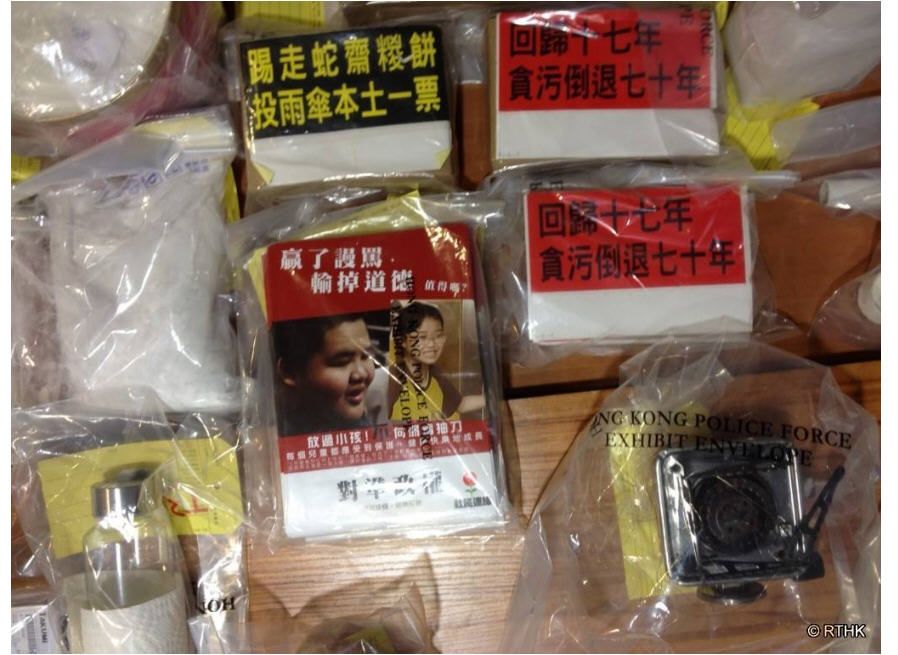
- The NIP says "handover of Hong Kong" whereas authentic localists say "transfer
of sovereignty";
- The NIP says "Chun Ying" whereas authentic localists say "689";
- The NIP says to kick away "snake meals/vegetarian meals/glutinous rice
wraps/cake" (which is the nickname of a pro-establishment Wen Wei Po forum user)
whereas the rest of the world says "snake meals/vegetarian meals/cake/glutinous
rice wraps";
- The NIP says "Umbrella Localism" whereas authentic localists don't want any
association with any umbrellas because that movement is a sissy non-violent
pantomime;
- The NIP says "national independence" whereas authentic localists hate the
Association to Support Patriotic Democratic Movements in China for wanting "to
build a democratic China".
All in all, this is very suspicious. Therefore pro-democracy Hongkongers should
remain united together and not be divided by the evil Communists.
-
沒事就兄弟,出事就契弟 When things run smoothly, we are brothers. When trouble comes, I
don't know the bastard.
- They used to explain the schisms (Hong Kong Priority, Hong Kong Indigenous,
Hong Kong Localism Power, Hong Kong Localist Democracy Front, etc) away by
saying that "there is no need to have the same slogans as long as we have the
same goals." But today, they suddenly declared that there are standard
linguistic codes in order to be genuine Localists. This is quite embarrassing.
- Video: The People's Front
in Monty Python's
Life of
Brian.
- Yes, the National Independent
Party don't act like authentic Localists (see, for example, Civic Passion's Wong
Yeung-tat showing up in a boxing ring and getting shellacked) who are all talk and
no action.
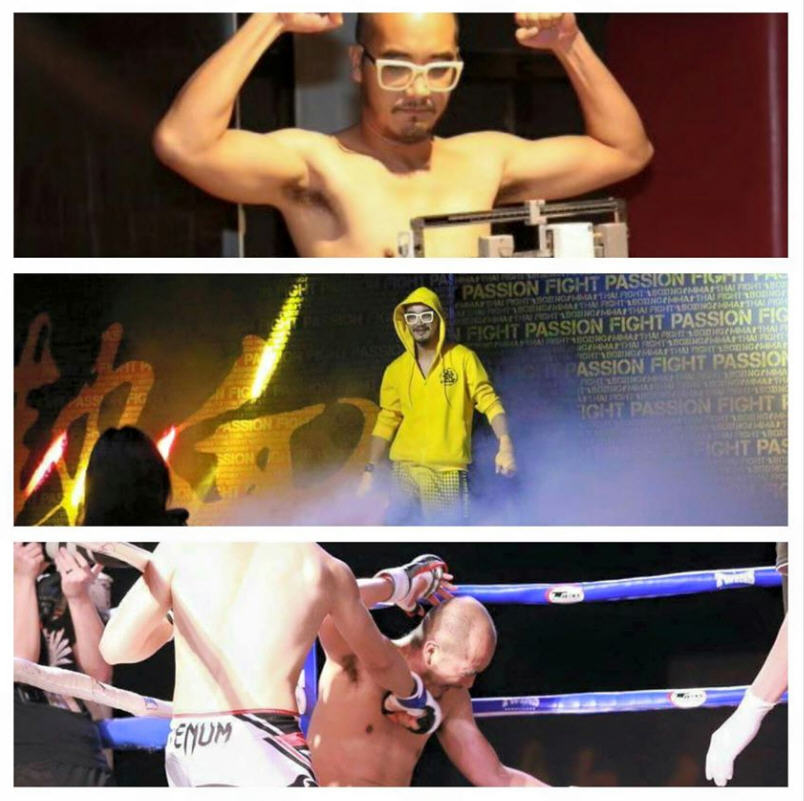
- (Sing
Pao) On that evening, the individuals set off a bomb on the roof of the
ATV studio for testing purposes. Smoke could be seen. When the police arrested
the individuals, one of them resisted and shouted: "I am going to kill you all
... I hate you ... Long live democracy!"
- In the United States of America,
these terrorists would be subjected to waterboarding (which is merely enhanced
interrogation and therefore not torture).
Q1. Do you think the government
proposal for universal suffrage is more, less or the same as the current system?
71%: More
10%: Less
12%: The same
5%: Hard to say
2%: No opinion
Q2. DO you think that
Legislative Council should pass the government's proposal?
64%: Yes
26%: No
7%: Hard to say/don't care
3%: No opinion
Q3. When a legislator holds a
position on constitutional reform that is different from the majority
preference, do you think the legislator should follow majority opinion?
78%: Yes
11%: No
6%: Hard to say/don't care
5%: No opinion
Q4. Are you confident that the
2017 Chief Executive election proposal will be passed by the Legislative
Council?
9%: A lot of confidence
9%: Some confidence
36%: Not a lot of confidence
31%: No confidence
11%: Hard to say
4%: No opinion
Q5. Do you think that the
pan-democrat legislators can get an even more democratic Chief Executive
election system by vetoing this proposal?
18%: Yes
72%: No
8%: Hard to say
2%: No opinion
Q6. If there is no universal
suffrage for the 2017 Chief Executive election, how many years later will it come?
9%: 5 years
20%: 10 years
16%: 15 years
14%: 20 years or more
34%: Hard to say
7%: No opinion
Q7. If the constitutional reform
proposal is vetoed, who is the biggest loser?
10%: The central government
18%: The pan-democrats
51%: The people of Hong Kong
12%: The HKSAR government
3%: The pro-establishment camp
1%: Others
3%: No losers
1%: Hard to say
1%: No opinion
Q8. If the constitutional reform
proposal is vetoed, who is most responsible?
16%: The central government
51%: The pan-democrats
3%: The people of Hong Kong
18%: The HKSAR government
2%: The pro-establishment camp
1%: Others
8%: Hard to say
1%: No opinion
Q10. If the pan-democrats vetoed
the constitutional reform proposal, will you vote for any pan-democrats who
vetoed the bill the next time?
20%: Yes
61%: No
13%: Undecided
6%: No opinion
(Wikipedia)
Yeung Kwong
Born in 1926, Yeung became a member of the
Hong Kong Tramways Workers Union in 1948 and led strikes by Hong Kong
Tramway's fare conductors the following year. He served as chairman of
the Hong Kong Federation of Trade Unions (FTU), the largest pro-Communist
labour union in Hong Kong, from 1962 to 1980, and then its president between
1980 and 1988. From 1973 to 1987, he was a local deputy to the National
People's Congress. During the Hong Kong 1967 Leftist Riots, which was
inspired by the mainland China's Cultural Revolution and escalated from a
labour dispute at a plastic-flower factory in San Po Kong, Yeung served as
director of the Hong Kong and Kowloon Committee for Anti-Hong Kong British
Persecution Struggle. Thousands were injured and 51 died, 15 of whom were
killed in bombings planted by the Leftists. Nominated by the FTU, then Chief
Executive Tung Chee-hwa awarded the Grand Bauhinia Medal, the highest honour
in Hong Kong, to Yeung for his "outstanding contribution to the labour
movement and labour welfare in Hong Kong and for his dedicated community
service" in 2001. In the morning of 16 May 2015, Yeung died at the Prince of
Wales Hospital in Sha Tin after he underwent a heart operation last year.
(The
Standard) June 15, 2015.
There were
demonstrations at the funeral of Yeung Kwong, former president of the Federation
of Trade Unions. Just before 10am, Hong Kong Indigenous protesters marched from
Hung Hom MTR station to the funeral home, chanting slogans. They accused Yeung
of being responsible for the violence during the deadly riots 48 years ago. FTU
president Lam Suk-yee delivered an eulogy at the service. Yeung was director of
the Anti-British Struggle Committee at the time of the riots, which saw 51
people killed and thousands injured. He was controversially awarded the Grand
Bauhinia Medal in 2001.
(EJinsight)
June 15, 2015.
A
spokesman for the political group Hong Kong Indigenous offered an apology to
the family of former communist labor leader Yeung Kwong after holding a
protest at the latter’s funeral on Sunday.
Ray
Wong Toi-yeung said his group did not mean to offend Yeung’s family and
relatives but staged the protest to assail the government for heaping
praises on the late unionist who led the 1967 leftist riots that killed
scores of Hong Kong people, Ming Pao Daily reported on Monday.
In
Sunday’s protest, activists brought pineapples to symbolize home-made bombs
used by rioters in 1967 and mock at Yeung’s memory for his role in the
turmoil. Wong also uncorked a bottle of champagne to mark Yeung’s death.
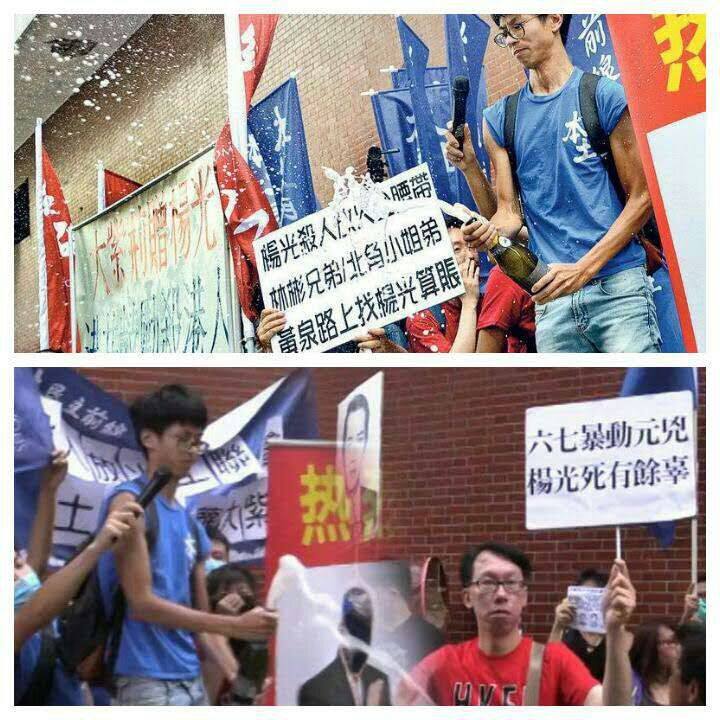
Those
who attended the funeral were Chief Executive Leung Chun-ying, Secretary for
Home Affairs Tsang Tak-sing, Secretary for Labour and Welfare Matthew Cheung
Kin-chung, and former secretary for justice Elsie Leung Oi-sie. When CY
Leung walked out of the funeral home, several protesters attempted to climb
over the barricades but were stopped by police officers.
Paying
tribute to Yeung, current HKFTU chief Lam Shuk-yee said Yeung was
instrumental in introducing water supply from Dongjiang River in Guangdong
to Hong Kong in the 1960s and exemplified bravery in leading the protests in
1967 to fight for better benefits for the working class.
Hong
Kong Indigenous was one of the groups that joined the pro-democracy Occupy
Movement last year and the protests against mainland parallel traders
earlier this year.
Videos:
(Resistance Live)
https://www.youtube.com/watch?v=2RbTdZxyX_k
(Resistance Live)
https://www.youtube.com/watch?v=UM3dP3LneEU Opening the champagne bottle
and chanting "Yeung Kwong go to hell!"
(SocREC)
https://www.youtube.com/watch?v=vz7jeIoji-I CY Leung and Zhang Xiao-ming
leave the funeral home.
(SocREC)
https://www.youtube.com/watch?v=vK5GMAgDsI4
(Ming Pao)
https://www.youtube.com/watch?v=73AS5spUU-c
(0:58) Lam Suk-yee: We all respect our predecessor. He dedicated his life
towards the workers' lives and to defend their rights. Therefore we respect
him. This funeral is not the place for political arguments. We hope that
everybody can respect others, respect the deceased. There are other
occasions for demonstrations and protests. Thank you.
(1:37) Reporter: How are people being disrespectful? Can you be more
specific?
(1:39) Lam Suk-yee: I am still saying that this is a funeral service and not
a political squabble. I hope that people can respect his family and his
colleagues.
Internet comments:
- The leftist riots took place in 1967,
which is 48 years ago. Practically none of these demonstrators were born
yet. Some of their fathers weren't even born yet. It doesn't mean that they
can't have a point of view on that piece of history, but they should be more
substantive than just chanting "Down with the Communists" and "Yeung Kwong,
go to hell!"
- At least when the angry Chinese patriots rant about the Yasukuni war
shrine, they try to tie it to concerns about the rise of Japanese
militarism.
- If the localists want to
demonstrate/protest against CY Leung and Zhang Xiaoming, there are plenty of
opportunities. The reason why they choose the funeral service of Yeung Kwong
was precisely because this is going to offend a lot of traditionally minded
Hongkongers. That's fine. But bizarrely Hong Kong Indigenous' Ray Wong
issued an apology afterwards. They intended to offend and they got what they
want. Why retreat after the damage was done?
- "Ray
Wong Toi-yeung said his group did not mean to offend Yeung’s family and
relatives but staged the protest to assail the government for heaping
praises on the late unionist who led the 1967 leftist riots that killed
scores of Hong Kong people, Ming Pao Daily reported on Monday." In what
conceivable way could Ray Wong think that opening champagne and chanting "Yeung
Kwong go to hell" wouldn't be offending Yeung's family and relatives. What
was he thinking?
- Most likely, he didn't imagine any such until he went home and his parents
and grandparents gave him hell and then it dawned on him that some regular people
may get very upset over this type of behavior.
- The
1967 Leftist Riots was the original Hong Kong indigenous resistance
movement against a foreign colonial power. The Hong Kong Indigenous said
that Yeung Kwong was responsible for the murder of dozens of Hongkongers
during those riots. Look at the list of
casualties carefully: How many were "beaten/shot to death by
police"?
The Yellow Ribbons talk about how evil and brutal the Hong Kong Police are.
Look at these descriptions from 1967 about the Hong Kong Royal Police:
Chan Kwong-sang, a student barber, beaten to
death by riot police at Wong Tai Sin Resettlement Area.
Tsui Tin Por, a worker of Mechanics Division Public Works Department, beaten
to death at Wong Tai Sin Police Station after arrest.
Lai Chung, a worker of Towngas, shot by police in a raid, then killed by
drowning.
Tsang Ming, a worker to Towngas, shot by beaten to death by police in a raid
...
- In the morning, the Localists
demonstrated against a bomb-maker. In the evening, they went and built their
own bombs (see #271).
(EJinsight)
June 16, 2015.
Police have seized some explosives and
arrested nine people after a raid on an abandoned former ATV film studio in
Sai Kung, Radio Television Hong Kong reported Monday. Among the arrested,
four were women while the rest were male, according to the report. All the
detained were said to be in the 21 to 34 age group. They included a student,
a teaching assistant and some unemployed persons. Police suspect some of
them may be linked to a local radical group. The arrests came as lawmakers
prepare to vote on the government’s controversial political reform bill this
week.
The vacant former ATV studio on Ho Chung
Road, where the explosives were seized, has been sealed by the police since
Sunday night after inspectors from the Organized Crime and Triad Bureau
found explosive devices there, Ming Pao Daily reported. The police bomb
squad and firefighters were called to the site. Police say they believe the
building was being used to make and test the explosive devices.
Meanwhile, Apple Daily reported that
inspectors took away evidence at about 7:45 am on Monday. Among the things
they picked up were an air rifle, three bullet clips and an electronic
scale. Inspectors also found two bottles, one containing a deep-brown fluid
and another containing a transparent fluid as well as some white powder in
plastic bags, according to the report. The studio, where security guards
were stationed during daytime, used to be a main site for ATV to film its TV
dramas before being abandoned many years ago.
(SCMP)
June 16, 2015.
Nine radical activists were arrested in
Hong Kong this morning after police found powerful explosives they suspect
were intended to be detonated before the Legislative Council debates the
government’s political reform package this week. The highly unstable
explosives, known as TATP, were seized at the vacant former ATV studio in
Sai Kung in the early hours of this morning by the police bomb squad, which
carried out a controlled explosion at the site.
The discovery was swiftly followed by the
arrest of five men and four women from Hong Kong, aged 21 to 34, in a series
of raids across the city by the force’s elite Organised Crime and Triad
Bureau. The suspects include a post-secondary student, a teaching assistant,
a construction worker, a technician, and three unemployed people, a police
source said.
The nine suspects are core members of a
localist radical group, which had discussed launching a bomb attack online,
according to the source. “Some of them were picked up in the vacant studio
[in Sai Kung] when they allegedly tried to make home-made bombs and tested
the power of the devices,” the source said.
Chemical substances which could be used to
make explosives were also confiscated together with air guns in some of the
suspects’ homes during the raids, the source added. It is understood the
explosive seized in the raids is triacetone triperoxide – also known as TATP
– which has been used in deadly terrorist attacks around the world,
including in Israel and the London bombings on July 7, 2005 in which 52
people died and more than 700 were injured.
The source failed to say how many
explosives or chemical substances had been seized in the operation but said
they were very powerful and could cause fatalities if detonated. One test
tube of the material is powerful enough to "blow a car into pieces", the
source said.
The discovery of the explosives was made
when officers raided the ATV studio off Ho Chung Road in Sai Kung. Bomb
disposal officers were called in to destroy the material in a controlled
explosion at the scene. Police also seized an air rifle and equipment
allegedly used in the manufacture of explosives at the studio. A motorcycle
found at the site was impounded. “More arrests are expected as the
investigation is continuing,” another police source said.
(Oriental
Daily) June 16, 2015.
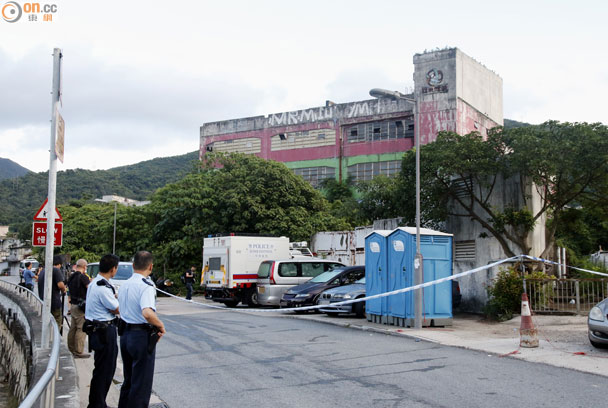
The police found large amount of
explosive materials at the abandoned ATV film studio in Ho Chung Village, Sai
Kung district last night. There were many bags containing nitrate. Explosive
experts came and remove the suspicious materials and also detonated some of the
materials at the location.
When nitrate is mixed with sulphur
and carbon ingredients, it becomes a powerful explosive material. The Norwegian
terrorist
Anders Behring Breivik used
ANFO
(ammonium nitrate/fuel oil) to build the bomb that killed 8 persons in Oslo.
(Oriental
Daily) June 16, 2015.
Nine indigenous/localist/nativist
activists were arrested on suspicion of bomb-making. According to information,
the target of their action was the constitutional reform and they wanted to use
the bombs to set off fear. The abandoned ATV was used as a bomb factory as well
as testing ground. Those arrested included students, workers and a teaching
assistant.
(Oriental
Daily) June 16, 2015.
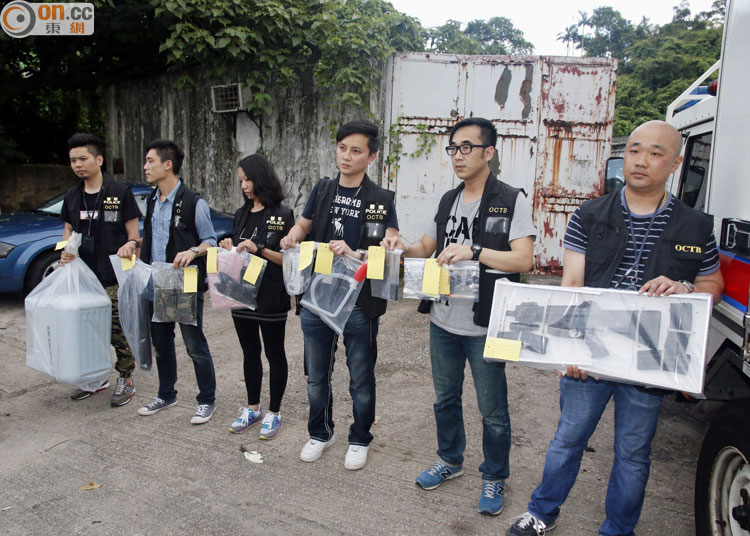
After daybreak, the police
searched the site thoroughly. The explosive materials were found on the roof of
the old ATV studio and on the persons of the arrested individuals. The police
also conducted searches and made arrests elsewhere in Hong Kong. So far at least
five males and four females have been arrested.
(Oriental
Daily) June 16, 2015.
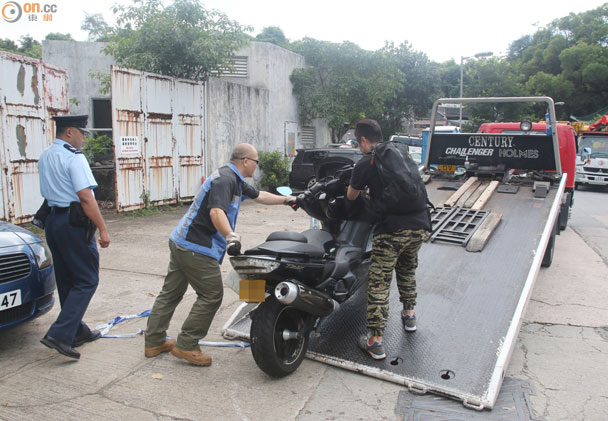
The police arrested nine
individuals who were testing bombs at the time. The police also impounded a
motorcycle. The owner of this motorcycle had previously been arrested in the
Occupy Yuen Long anti-parallel trader demonstration for possession of pepper oil
and a switchblade.
(Oriental
Daily) June 16, 2015.
Our reporter called up the "Father
of Hong Kong independence" Wan Chin for comments. When he learned that some
Localists have been arrested for bomb-making/testing and adapting guns, he hung
up the phone.
Our reporter also called up North
District Parallel Trade Concern Group convener Leung Kam-sing. He said that the
case is still under investigation so that it is not clear that Localists were
manufacturing bombs. He said that that there is no need for large-scale
demonstrations given that the constitutional reform is almost certain to be
vetoed.
Polytechnic University tutor and
Civic Passion member Cheng Chung-tai said that it is not confirmed yet that
Localists were involved. "At this time, you can say whatever group that you
wish!" He said that Civic Passion has no plans to organize resistance during
the Legco vote.
Population Policy Concern Group
convener Roy Tam said that the Sai Kung affair has nothing to do with the
moderate Localists, and he has no information that any of his members have been
arrested.
(HKG
Pao) June 15, 2015.
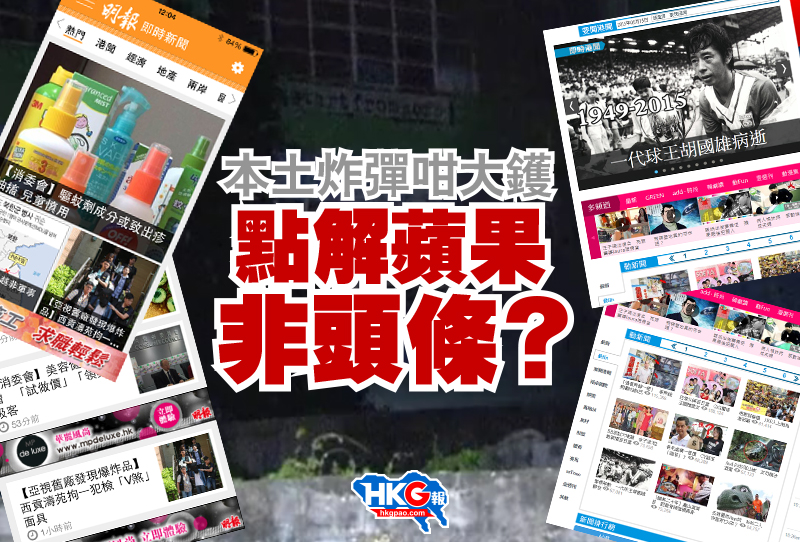
The police operation at the
bomb-making factory was the top news story at most news organizations except for
two.
At Apple Daily, the headline story
was "Soccer king Woo Kwok-hung passes away." If you hit the arrow at the bottom
right of the photo, you will get to the story about "Explosive materials at old
ATV studio." Isn't this deliberate low-profile handling intended to cover up bad
news about the Localists?
At Ming Pao (nicknamed Apple
Daily's supplement), the top news story of the day was the Consumer Council
warning people that they may get skin rash from mosquito repellant. The second
news story is about young North Koreans fleeing to South Korea. The third news
story was the "bomb factory." Does Ming Pao think that mosquitoes and North
Koreans are more threatening than bombs?
So what are we supposed to think?
Do these newspapers support Localism/Hong Kong Independence? Do they approve of
violent radical action? Or does their management have something else in mind?
(Oriental
Daily) July 15, 2015.
Based upon information, the police
went to an abandoned quarry in Ma On Shan and removed a number of explosive
materials (including sulfur, thinner, etc). According to experts, sulfur mixed
with thinner will create an obnoxious smoke.
(Oriental
Daily) July 15, 2015.
According to the police, they
searched the Sai Kung home of one suspect and found three bottles containing about
two liters of TATP (Triacetone
Triperoxide).
(Oriental
Daily) July 17, 2015.
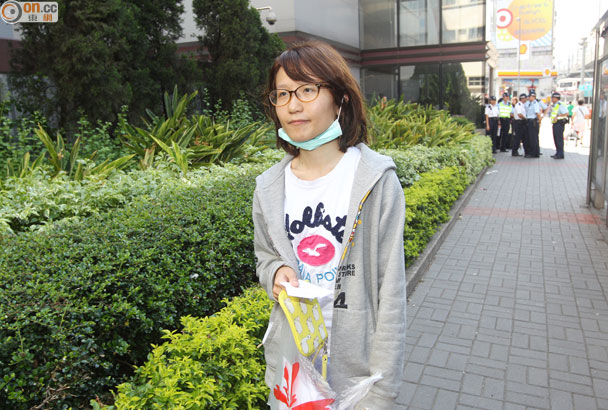
Chan Cheuk-lam was able to post
bail. She told the reporters that she is innocent or else she would have kept
wearing a surgical mask. She said that she had already purchased airplane
tickets to Hokkaido. If it weren't for this case, she would be eating wagyu
beef
in Japan right now.
(Oriental
Daily) June 17, 2015.
The six defendants were Chan Yiu-shing, Cheng
Wei-shing, Rizzy Pennelli, Woo Kai-fu, Man Ting-lock and Sarene Chan Cheuk-lam,
ages 21 to 34. They were charged illegally and maliciously manufacturing
explosive devices to cause explosions which may damage lives and property.
According to the prosecutor, the police
conducted surveillance on May 27 and found the first, second, fourth and fifth
defendant entering into the building and supposedly testing explosives that
created light. On June 14, the police observed the second and third defendant
entering into the building, staying for more than half an hour and creating
some smoke. The police arrested those two and found 7 kilograms of chemicals
and five liters of liquid materials. The first and fourth defendants were
arrested in Wanchai. The fifth and sixth defendants were arrested in their
residences.
The first 34-year-old first defendant Chan
Yiu-shing is unemployed and lives with his parents. His parents are willing to
provide $5,000 bail. Chan complains of being beaten by the police.
The second defendant Cheng Wai-shing is a
construction worker. Cheng complains of being beaten by the police.
The third defendant Rizzy Pennelli lives with
his family and says that the police lack strong evidence and therefore he
should be allowed to be bailed out. Pennelli complains of being beaten by the
police.
The first five defendants were not allowed
bail, because the magistrate says that the charges were serious and he was
sure why these individuals are in possess these restricted materials.
The sixth defendant Sarene Chan Cheuk-lam
said that she only obliged someone's request to purchase something and
therefore she was allowed to be bailed out on $20,000. She also complains
about being intimidated by the police.
(SCMP)
June 18, 2015.
Six defendants charged over a bomb plot in
Hong Kong yesterday accused police of assaulting them or using threats to get
them to cooperate with the investigation.
The five men and one woman, aged 21 to 34,
reported the alleged incidents to acting Principal Magistrate Don So Man-lung
during their first appearance at Kwun Tong Court.
Rizzy Pennelli, an Italian national born and
raised in Hong Kong, suffered repeated blows to various parts of his body and
his private parts were "pulled", the man's lawyer, Michael Vidler, said. "A
woman police officer hit him with a hard object on the neck," Vidler told the
court. Pennelli suffered bruises and
abrasions over his body and face as a result, Vidler said.
Pennelli was in court along with Hongkongers
Chan Yiu-shing, Cheng Wai-shing, Wu Kai-fu, Man Ting-lock and the case's sole
female defendant, Sarene Chan Cheuk-lam. They face a joint count of
"conspiracy to cause an explosion, or making or keeping explosive with intent
to endanger life or property" between May 27 and June 14.
The six were accused of unlawfully and
maliciously making an explosive substance, with which they conspired to cause
an explosion in the city.
In Sarene Chan's complaint against the
police, officers allegedly threatened to arrest her husband, a doctor, if she
refused to cooperate, defence counsel Christopher Wong Tat-ming said. The
officers warned that the arrest could jeopardise the husband's career, Wong
said.
Chan Yiu-shing claimed police had tried to
coax an admission out of him by offering to mitigate for him in court. "At the
point of the arrest when [Chan] was handcuffed, he was [also] assaulted by
police officers," his counsel told the court.
Man's right to remain silent was allegedly
encroached upon, the same counsel said. The court also heard Man had fainted
after an encounter with the police but was denied treatment. Officers told Man
that he would have to shoulder the blame for others should he refuse to speak
in a video interview, the court heard.
Sarene Chan was granted bail, while the other
five were remanded in custody. She is a master's degree holder and online
merchandiser, a court document shows. Cheng is a construction site worker,
while Pennelli is an engineering graduate and a technician. The rest are
unemployed.
Senior prosecutor Noelle Chit applied for an
eight-week adjournment to allow time for forensic examination of more than 10
kinds of chemicals. The police investigation was ongoing, Chit said, including
studying the defendants' electronic devices, which might result in more
arrests. She said the case was expected to go to the High Court.
So said he would grant the prosecution only
four more weeks, adding that he did not expect the scope of investigation to
be too wide. The magistrate adjourned the case to July 22.
(SCMP)
June 17, 2017.
Six defendants charged over a bomb
plot in Hong Kong yesterday accused police of assaulting them or using threats
to get them to cooperate with the investigation.
The five men and
one woman, aged 21 to 34, reported the alleged incidents to acting Principal
Magistrate Don So Man-lung during their first appearance at Kwun Tong Court.
Rizzy Pennelli,
an Italian national born and raised in Hong Kong, suffered repeated blows to
various parts of his body and his private parts were "pulled", the man's
lawyer, Michael Vidler, said. "A woman police officer hit him with a hard
object on the neck," Vidler told the court.
Pennelli
suffered bruises and abrasions over his body and face as a result, Vidler
said.
Pennelli was in
court along with Hongkongers Chan Yiu-shing, Cheng Wai-shing, Wu Kai-fu, Man
Ting-lock and the case's sole female defendant, Sarene Chan Cheuk-lam. They
face a joint count of "conspiracy to cause an explosion, or making or
keeping explosive with intent to endanger life or property" between May 27
and June 14.
The six were
accused of unlawfully and maliciously making an explosive substance, with
which they conspired to cause an explosion in the city.
In Sarene Chan's
complaint against the police, officers allegedly threatened to arrest her
husband, a doctor, if she refused to cooperate, defence counsel Christopher
Wong Tat-ming said.
The officers
warned that the arrest could jeopardise the husband's career, Wong said.
Chan Yiu-shing
claimed police had tried to coax an admission out of him by offering to
mitigate for him in court.
"At the point of
the arrest when [Chan] was handcuffed, he was [also] assaulted by police
officers," his counsel told the court.
Man's right to
remain silent was allegedly encroached upon, the same counsel said. The
court also heard Man had fainted after an encounter with the police but was
denied treatment.
Officers told
Man that he would have to shoulder the blame for others should he refuse to
speak in a video interview, the court heard.
Sarene Chan was
granted bail, while the other five were remanded in custody.
She is a
master's degree holder and online merchandiser, a court document shows.
Cheng is a construction site worker, while Pennelli is an engineering
graduate and a technician. The rest are unemployed.
Senior
prosecutor Noelle Chit applied for an eight-week adjournment to allow time
for forensic examination of more than 10 kinds of chemicals.
The police
investigation was ongoing, Chit said, including studying the defendants'
electronic devices, which might result in more arrests.
She said the
case was expected to go to the High Court.
So said he would
grant the prosecution only four more weeks, adding that he did not expect
the scope of investigation to be too wide. The magistrate adjourned the case
to July 22.
Internet comments:
- All this evolved from the
original operation known as
Occupy Central with Love and Peace. Now we have a 13-year-old girl
running away from home to join the Occupy movement and people making bombs to
deliver more love and peace to the people. Great job!
- Whom do you think the bombs will
be directed at? Where will they be set off?
Police Headquarters Wanchai against the police?
Government Headquarters against public servants?
Government House against the Chief Executive?
Legislative Council against the demonstrators and the Tim Mei Village residents?
The High Court against the judges, magistrates and lawyers?
China Liaison Office against the Chinese Communists?
People's Liberation Army barracks against the occupying force?
Causeway Bay Sogo Department Store against the civilian population?
Victoria Park on July 1st against the demonstration marchers?
Jimmy Lai's front lawn?
...
- How did the police bust this
case? Most of the suspects were arrested at the scene, so this does not seem
random.
Either some neighbor called the police about the explosive sounds that were
coming from the unused ATV studio at night, or else the operation was penetrated
by a police informer/mole/undercover officer who waited to collect enough evidence.
- (Apple
Daily) The police had information on this group of individuals before.
Three weeks ago, the police already placed surveillance cameras and equipment at
the location. They decided to make the arrests last night.
- In the morning, the Localists
went out to the funeral parlor in Hung Hom to demonstrate against the late Yeung
Kwong, who was the leader of the movement to lay bombs around Hong Kong in 1967.
In the evening, they went back to the abandoned ATV studio to build and test
bombs.
- Apple Daily and Ming Pao's
editorial decisions take time, because their headline stories are based upon
one-reporter-one-vote. It takes a while to contact all the reporters and tally
their votes.
- You are not allowed to express any skepticism/cynicism about Apple Daily/Ming Pao's
choices of featured news stories, because the Hong Kong Journalists Association will say that this is
interfering with editorial independence.
- Localists? Is a V mask evidence?
Is a stack of League of Social Democrats pamphlets evidence?
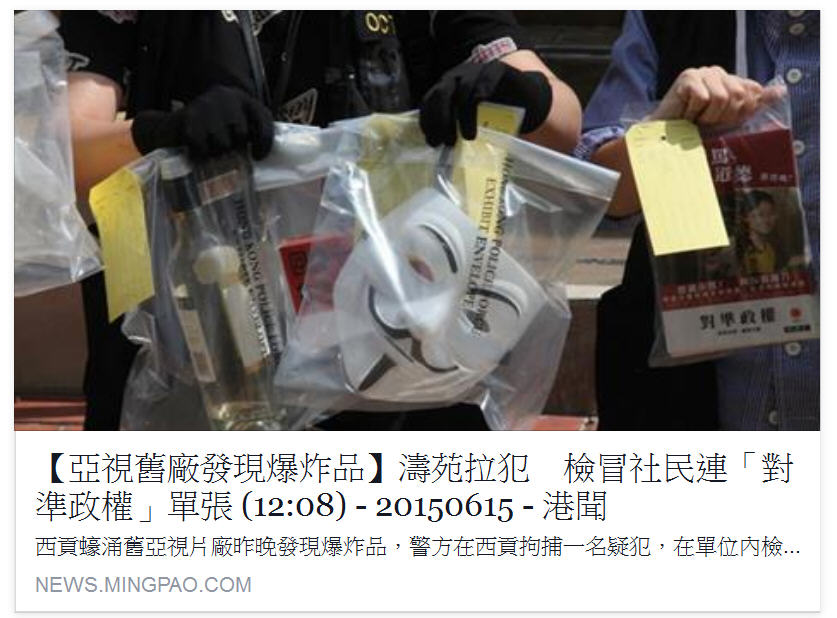
- (Commercial
Radio) One individual was arrested in his Costa Bello (Sai Kung) home
where police found a pamphlet entitled: "You win the war of verbal abuse but you
lose your morality -- is that worth it?" under the name of the League of Social
Democrats. Previously, the organization had already issued a notice that this
pamphlet did not come from them.
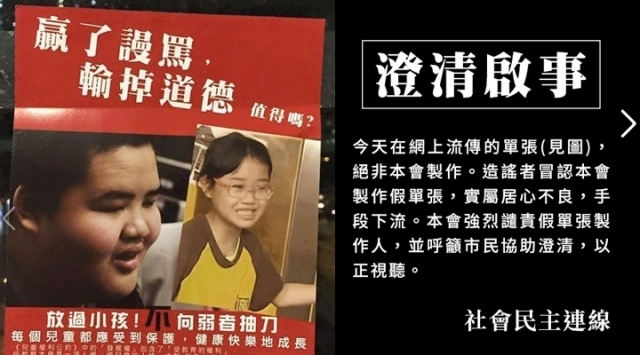
- The denial was made by League of Social Democrats chairman Leung Kwok-hung.
Who is going to believe him after the $100 million lie?
- This is a case in which all
keyboard warriors should be wary about "following the preceding vehicle too
closely." Much of the information so far is unofficial, so you should not be
over-confident and over-interpret.
- Supplementary information:
(Oriental
Daily) The police investigation began after the National Independent
Party's Facebook talked about casualties at the Legislative Council which
will be turned into rubble. The police trailed the individuals for some time. On
this evening, the police observed two men entering the abandoned ATV studio and
tested explosives on the roof, releasing a puff of smoke. The police took action
and apprehended the two individuals. They found seven kilograms of nitrate, five
liters of liquid and some combination of the two. There were also detonators on
the ground. The police thought that the mixture was volatile and therefore
detonated it. Meanwhile, other police officers went to a Sai Kung villa and
found three liters of TATP. Based upon the testimony of the two arrestees, the
police arrested three men and four women, all of whom were related to the
National Independent Party. Later the police arrested a 58-year-old man at the
Lo Wu border crossing. He is a businessman suspected of purchasing chemicals on
behalf of his daughter.
(Apple
Daily) The Police's Crime Investigation Division took over the case from
the Security Bureau and began to trail the target individuals. They observed
that these people were using the old ATV studio as base and sending dangerous
materials, chemicals and guns over there. Yesterday evening, the police observed
that two men bought some chemicals and went by motorcycle to the ATV studio.
Then they test-detonated on the roof. The police deemed the moment to be right
and rushed in to arrest the two. At the same time, police officers in the
Organized Crime Unit arrested the remaining individuals all over Hong Kong.
(Oriental
Daily) The police found maps that indicated a number of targets in
Wanchai and Admiralty and an "explosive warehouse." The location of the warehouse
is the abandoned quarry in Ma On Shan. The police went out there and found a
certain amount of chemicals and thinner that can be used to make bombs.
(The
Standard) 'Life goes on if vote fails. June 12, 2015.
Chief Secretary
Carrie Lam Cheng Yuet-ngor says she is cautiously optimistic on Hong Kong's
prospects post-reform. But she again insisted that it will be a step
backward if the Legislative Council does not pass the bill next week. Lam
said she did not expect the pan-democrats to continue their noncooperative
movement in a large-scale manner.
She said Legco's Public Works Subcommittee
has stepped up passage of several government applications for funding of
public works projects and pan-democratic lawmakers should know that citizens
would be angered if they continued to be noncooperative. Even if reform is
voted down, the central government is unlikely to view pan-democrats as
parties that they cannot communicate with, she said. The government will
continue to foster closer communication with the young generation to make
them know their opinions are valued by the government, she said.
In an interview with Sing Tao Daily, sister
publication of The Standard, Lam said that if political reform is voted
down, all efforts spent previously on setting the timeframe and roadmap on
the implementation of universal suffrage would be lost. "It's not only that
no progress will be made [on political reform] but it's also a step
backward," she said.
Lam said some pan-democratic lawmakers had
privately asked her why she still insisted on promoting the government's
reform proposal even if reform is not good enough. But Lam stressed that she
truly believes that the government's reform proposal "is worth recommending"
to the public.
She expressed hopes the proposal can be
passed. Lam added the government will not set up a platform to discuss
political reform if the bill is voted down. "It is meaningless," said Lam,
adding that setting up a platform might not help forge consensus.
She said it will be difficult for the next
chief executive to initiate the political reform process. If reform is voted
down, the chief executive will still be elected by 1,200 Election Committee
members in 2017, she said.
She questioned how the public can pressure
the chief executive to initiate a new five-step procedure on political
reform. Lam said that if the chief executive is elected by some five
million voters via "one person one vote" in 2017, candidates in the election
need to express their stance on universal suffrage.
(Speakout
HK) June 13, 2015.
The Hong Kong Medical Association
announced the results of its third poll of membership opinions on the
constitutional reform. Out of 6,659 filled questionnaires, 47.4% supported the
constitutional reform proposal and 49.7% opposed. The remaining persons gave no
opinion. The response rate was 43.8%, which is very high for mail surveys. This
shows that the subject was important to its members, and we should respect the
results.
These polls shows that neither
side holds an overwhelming majority. That is something that everybody can agree
upon.
In less than a week, the vote will
take place. At this time, the pan-democrats are very firm on their intention to
veto the proposal. At least two-thirds of the legislative council (47 out of 70
legislators) must approve any constitutional reform, and the 27 pan-democrats
are adamant that they will veto. There does not appear any chance for change.
The pan-democrats want to veto the
proposal and then start all over again. But is their next step viable? They have
so far never given a substantive response.
The pan-democrats may say that
they have offered many "recommendations" and "proposals" already. Frankly, how
many of these fall within the Basic Law framework? (For example, the pan-demcorats'
sine qua non civil nomination is not consistent with
Basic Law Annex I). When they had the opportunity to meet with the
central government officials, they always stipulate up front that the August
31st resolution of the National People's Congress Standing Committee must be
rescinded. So what concessions do they expect go get out of the central
government?
Even if the pan-democrats can come
up with a constitutional reform proposal that all 27 of their legislators can
accept, can they get enough another 20 votes to reach 47? So even if they
restart the five-step process, an even larger number of legislators may vote
down their proposal.
In medicine, you treat an ailment
with the right medicine. Since public opinion polls show the present proposal
has the support of one half or more of the people, it is better to find some
reasonable and legal fine-tuning to obtain more support. That is the most
pragmatic approach. But universal suffrage in 2017 now seems impossible.
Dear pan-democrat fans, you want
to reject the proposed one-person-one-vote system but you can't come up with any
feasible proposal. This is like abandoning the patient just when he seems to be
on the way to recovery.
A doctor must provide a viable
treatment for a patient. Similarly, pan-democrats must provide a viable
treatment for the public, instead of just rejecting the existing proposal and
press the NO button to veto after shouting a few slogans about freedom and
democracy.
Instead of deciding which button
to press, the pan-democrats should worry about explaining what their next steps
are for the purpose of realizing universal suffrage. And they need to give up
any impractical ideas.
(TVB)
On The Record: Interview of Albert Ho by Kenneth Ng. June 13, 2015.
(0:01) Ho: The August 31st
resolution has to be vetoed first. That is very clear. That's because the August
31st resolution was made because of CY Leung's report that began the
constitutional reform process. The veto would mean that this constitutional
reform process is over. Therefore the August 31st resolution no longer exists.
The next time, there will be a new report. A new decision. Therefore, I feel
that we must veto first.
(0:20) Ng: That is your
understanding.
(0:22) Ho: Yes.
(0:23) Ng: The central government
has a different understanding. When the times comes, who makes the decision? Do
you decide? Or does the central government decide? That is very clear.
(0:28) I can only use legal logic.
I can only use legal reasoning.
(0:32) How can you say legal
logic? Does the central government have to take their case to the High Court?
(0:37) Then that's it. We can only
speak of reason. If you want to do this by force, you lose public support.
Internet comment:
- The central government has
spoken: The August 31st framework has not yet been implemented, and therefore it
will not be modified until after experience is gathered after implementation.
Ministry of Foreign Affairs of the People's Republic of China (June
1, 2015)
The electoral reform
framework set out by the country's top legislature on Aug 31, 2014 will
remain in effect beyond 2017, a senior Beijing official told Hong Kong
lawmakers on Sunday.
Li Fei, deputy
secretary-general of the National People's Congress Standing Committee (NPCSC)
and chairman of the HKSAR Basic Law Committee, set the record straight
on the top legislature's power when he talked to Legislative Council
members at a meeting in Shenzhen.
Opposition members in
LegCo have demanded the revision of the NPCSC's Aug 31 decision, or they
would veto the government's reform blueprint when it is tabled at the
chamber in about two weeks' time. The package requires two-thirds
majority to pass into law.
Li reminded the Hong Kong
lawmakers that the resolution adopted last August does not specify an
expiry date and it will remain in effect for Chief Executive elections
after 2017. There is no possibility for the top legislature to revise
the decision without even putting it into practice, he said.
So why is Albert Ho still
in denial?
- If the August 31st
framework does not have an expiry date, we can just sit and wait until
2047 when One Country Two Systems expire and then we will have
one-person-one-vote under the unexpirable August 31st framework. Is this
the Grand Plan?
- Kenneth Ng took Albert Ho apart,
just like how he took Alex
Chow apart. Albert Ho tried to argue that vetoing the proposed
bill means that the August 31st resolution is vetoed as well to create a blank
blackboard once more. Kenneth Ng gave his now famous skeptical response ("That's
your understanding but ...") while trying to hold back his laughter. Albert Ho
probably has no idea what he was saying anyway.
- Albert Ho: "If you want to do
this by force, you lose public support." This is hilarious. When the public
opinion was against them, they said that they will only vote according to their
own conscience irrespective of what the people want. But now on the
Road
to Damascus, they are suddenly seeing the light of public opinion.
-
The
five-step process of constitutional development:
In accordance with the Basic Law and
the Interpretation of the NPCSC in 2004, the procedures for amending the
methods for the selection of the CE and for the formation of the LegCo
(also known as "5-Step Process of Constitutional Development") are as
follows:
- The CE to make a report to the NPCSC
as to whether there is a need to amend the two electoral methods,
- a determination to be made by the
NPCSC as to whether the electoral methods need to be amended,
- the resolutions on the amendments to
be introduced by the HKSAR Government to the LegCo, and be endorsed by
a two-thirds majority of all the members of the LegCo,
- consent to be given by the CE to the
motions endorsed by the LegCo, and
- the relevant bill to be reported by
the CE to the NPCSC for approval or for the record.
Steps 1, 3 and 4 are taken by the
Chief Executive, who will continued to be elected by a 1,200-person election
committee until as such time when one-person-one-vote is realized. CY Leung will
probably be re-elected. Why should he oblige the pan-democrats when he knows
that it will be fruitless?
Steps 2 and 5 are taken by the
National People's Congress Standing Committee? They came up with the August 31st
framework and they want to observe it in action before considering any
amendment. Why should they oblige the pan-democrats?
During Step 3, the HKSAR
Government will hold public consultations. If the pan-democrats signal that they
have the numbers to veto anything fits the August 31st framework, then the
process might as well as stop without wasting more time and energy.
Alternately, if the pan-democrats
signal that they have the numbers to veto anything except unrestricted civil nomination,
then the process might as well as stop because this is not permitted under
Basic Law Annex I.
- The August 31st resolution
reflected the central government's concerns about Hong Kong elected a Chief
Executive who does not love Hong Kong and/or China. The nomination committee is
designed to screen out such persons. Are they worrying too much?
Well, the August 31st resolution was made before the Umbrella Revolution and the
National Independent Party bomb factory. Shouldn't the central government be
even more concerned now? If the August 31st resolution is replaced, then a new
resolution will be even more restrictive.
(SCMP)
Hong Kong protesters march to Legislative Council to urge no vote on political
reform. June 14, 2015.
Several thousand pro-democracy supporters
marched from Victoria Park to the Legislative Council complex in Admiralty
today, to protest against the government’s electoral reform proposal as
lawmakers are set to debate and vote on the controversial pacakge later this
week. But the turnout fell short of march organisers’ expectations. They put
the number of marchers at 3,500, well short of their original estimate of
50,000. Police said 3,140 took part in the rally at its peak.
... Labour Party chairman Lee Cheuk-yan
said he was confident that pan-democratic lawmakers would vote down the
proposal. “We will definitely vote down the proposal,” Lee said at the
rally. Lee said: “We will not storm [Legco]. That is because if we do,
lawmakers won’t be able to vote. We don’t want to stall. Once it is voted
down, we need to come out again fighting for genuine universal suffrage.”
Internet comments:
- (INT News Channel)
https://www.youtube.com/watch?v=kwf4hiqSIXg Video of Civil Human Rights
Front march
- (INT News Channel)
https://www.youtube.com/watch?v=NOY43wCjQpk Video of demonstrators
chanting "Down with the Communist Party" at pro-Communist supporters
- (dbc)
https://www.youtube.com/watch?v=_FN9aLlTw0w Video of Civil Human Rights
Front march
- Lee Cheuk-yan said: "Once it is
voted down, we need to come out again fighting for genuine universal suffrage."
What does that mean? More marches on Sunday afternoons with several thousand
marchers (note: numbers are padded up as usual)? This is a dead end. They've
been doing this
shtick
for decades with nothing to show.
- To "come out again fighting"
means two things (1) keep marching on one Sunday every three months; and (2)
keep donating money to the pan-democrats. It is mostly about the second part.
- When 1,000,000 people come out
to march against something or the other, the big number proves that the issue
has mass support. When 3,000 people come out to march, the small number still
proves that the issue has mass support. Here is the statement of the day:
(SCMP)
“It might have to do with the recent reverse in public opinion
[according to surveys conducted by universities]. People now feel more
confident that the proposal will be voted down,” Sam Yip Kam-lung of the
Citizens Against Pseudo-Universal Suffrage Campaign formed by various
pan-democratic groups, told journalists after the march.
As if that is not proof enough,
“People might have decided to save
their energies for later,” he said.
- (Commercial
Radio) Civic Party legislator Alan Leong said that the number of
marchers today exceeded their expectations. He said that the government
must respect the fact that so many people still showed up in hot weather
as well as the certainty that the bill will be vetoed.
I recommend viewing the
Argument Clinic segment of Monty Python's Flying Circus.
- Just when I thought I was going to miss
Ting Hai after the last episode
of The Greed of Man ran on Friday, I now find a more than adequate
replacement in Alan Leong.
- The standard ratio of Civil Human
Rights Front-to-police crowd estimate ratio is typically 3-to-1. On this
day, it was only 3500-to-3140. Why are the CHRF so restrained today? And
the demonstrators were dismissed half an hour ahead of schedule. Their
hearts are not in this anymore.
- Civil Human Rights Front planned for
50,000 people for June 14 but only 3,500 (according to them) showed up.
But let's look ahead at the rest of their predictions:
(The
Standard) May 19, 2015. Civil Human Rights Front convener Daisy
Chan Sin-ying said an application has been submitted to book the Legco car
park for protests for June 14-18 and June 21-25. She said the front
expects about 100,000 protesters to surround the complex.
(Oriental
Daily) June 15, 2015. On this evening, the meeting began at 7pm.
There were about 100 persons. The number gradually increased to 300 by
9pm. (Note: that number includes the reporters)
(Oriental
Daily) June 16, 2015. On this evening, the meeting was attended by
about 200 persons. League of Social Democrats chairman Leung Kwok-hung and Scholarism convener Joshua Wong were present. Wong proposed for the people
to amend the Basic Law themselves, as if that's possible.
[Basic
Law Article 159:
The power of amendment of this Law shall
be vested in the National People's Congress.
The power to propose bills for amendments
to this Law shall be vested in the Standing Committee of the National
People's Congress, the State Council and the Hong Kong Special
Administrative Region. Amendment bills from the Hong Kong Special
Administrative Region shall be submitted to the National People's Congress
by the delegation of the Region to the National People's Congress after
obtaining the consent of two-thirds of the deputies of the Region to the
National People's Congress, two-thirds of all the members of the
Legislative Council of the Region, and the Chief Executive of the Region.
Before a bill for amendment to this Law
is put on the agenda of the National People's Congress, the Committee for
the Basic Law of the Hong Kong Special Administrative Region shall study
it and submit its views.
No amendment to this Law shall contravene
the established basic policies of the People's Republic of China regarding
Hong Kong. ]
(True
Brothers of Democracy blog) June 13, 2015.
On the evening of June 12, Civic
Passion's Wong Yeung-tat and Cheng Chung-tai met with Hong Kong Indigenous
Front's Ray Wong and Cheng Kan-moon to discuss the action plan before the vote
on the constitutional reform. Wong Yeung-tat said that all participants must be
prepared to be arrested and jailed. This is the time for Hong Kong "to use force
to resist the tyrants." Anyone who opposes the use of violence is a
capitulationist and therefore an enemy of Civic Passion. "We must carry out at
least three world-shaking events this year" so that Hong Kong independence can
become a hot international topic. This time, the pan-democrats are providing a
platform and therefore there has to be a big battle with the police. Apart from
being psychologically prepared, all combatants should wear protective equipment,
surgical masks, helmets, goggles and even full-body armor. Some of them will
carry wooden shields.
Wong Yeung-tat said that the Hong
Kong Police's Special Tactical Squad was the main force during the clearance of
Occupy Central and caused Civic Passion to suffer. Therefore, revenge shall be
made this time. This action will not only involve attacks on police officers,
but chaos should be created at the scene. The main methods include hitting with
rods and poles, spraying women's self-defense pepper spray and other chemical
sprays and tossing bottles containing inflammable liquid at the law enforcement
agents and the crowd. Amidst the chaos, an assault on the Legislative Council
will be made.
Ray Wong and Cheng Kam-mun said
that the current stock of materiels will be enough to guarantee that all
participants have helmets and goggles. The front-line chargers will have
full-body armor, the second-line chargers will have half-body armor. On June 15
and 16, Civic Passion will be readying the glass bottles and gasoline in the Tim
Mei Avenue tent city. A four-man action team will quickly assemble the petrol
bombs when the time comes.
Internet comments:
- (SCMP)
“I am here today to show my support for the pan-democrats. They need to vote
down the proposal,” said 55-year-old protester Stephen Au. "If anyone attempts
to storm [the Legislative Council], I won’t follow them. I don’t support such
radical actions.”
That would make Stephen Au a "Hong
Kong pig" in the eyes of the Valiant Warriors of the Hong Kong City-State.
(Bastille
Post) June 16, 2015.
There is a classification of the
pan-democrats into four groups on the basis of two dimensions. One dimension is
political ideas, which are either radical or moderate. The other dimension is
action tendencies, which are either idealistic or pragmatic.
The first type of democrats are
the radical idealists. They are not only idealists, but they will take radical
action. Examples are the suspects arrested at the Sai Kung bomb factory. These
people participated in Occupy Central and the anti-parallel traders protests.
They are now moving into more radical actions that will inflict casualties in
order to force the authorities to yield. This group is small in numbers, but
their actions can have huge consequences on society.
The second type of democrats are
the moderate idealists. They have ideas but they seldom act. Most of the
pan-democrat supporters are of this type. I have spoke to many young people.
They want to see the constitutional reform vetoed. They don't think the proposal
is sufficiently democratic and so they want it vetoed. As to what happens next
after the veto or how to fight successfully for democracy, these are not issues
that they contemplate about. They won't think about it. They think something is
bad and they oppose it. That's all.
The third type of democrats are
the radical pragmatists. They are radical but they are also pragmatic. The
leaders of the pan-democrat political parties fall into this type. Among the
pan-democrats, it used to be that the only radicals were the League of Social
Democrats and People Power. But now they are leading the mainstream political
parties such as the Democratic Party and Civic Party. The latter have absorbed
the lesson of the Democratic Party reaching a compromise with the central
government in 2007, with the conclusion that any pan-democrat party that cuts a
deal with the central government on the constitutional reform will be punished
in the next elections. Therefore they won't be caught and lose Legco seats. They
even wish other parties would compromise so that they can take over those seats
as well as enter the Chief Executive election.
The fourth type of democrats are
the moderate pragmatists. The most noteworthy ones are Civic Party's Ronny Tong
and the Democratic Party's Nelson Wong. Based upon the overall consideration of
the democracy project as a whole, they prefer a compromise bill. They want to
take a first step and then amend it later, because democracy will never take off
otherwise.
At this final moment of the
constitutional reform process, the central government's position is said to be
contained in nine words: 不調整、不讓步、不放棄.
Point #1: No adjustments to the proposal whatsoever. They won't tinker with
turning the corporate votes into individual votes, because they think that's
useless. Point #2: No concessions whatsoever. They will not promise that this
proposal is for the moment because it will be changed later. If they made such a
promise, the pan-democrats will press on with the next question: How will it be
changed? That'll lead to even greater arguments. Point #3: They won't give up
until it is over.
So the central government's
position is that they want the bill to pass, but they won't be too upset if it
isn't passed. The central government played an imperfect card and waited to see
if the pan-democrats will follow. But the democrats are without leadership and
cannot only follow the radicals. This means that the democracy movement is
reaching a dead end. After the constitutional reform proposal is vetoed, they
will end up with nothing. There is nothing on the horizon that will restart the
five-step constitutional reform process and give Hong Kong another shot at
universal suffrage. So this is how the people of Hong Kong lost their right to
use one-person-one-vote to elect their Chief Executive.
There is no future for a democracy
movement that has no leadership.
(SCMP)
Hong Kong pan-democrats face a quandary over their next move in political reform
battle. June 17, 2015.
Over the next few days, the battle
lines at the Legislative Council are firm, immoveable and well-rehearsed. It is
D-day for the vote on whether Hong Kong will choose its chief executive in 2017
by a citywide election between up to three pre-vetted candidates.
Pan-democrats, whose votes are critical
to ensuring the two-thirds majority necessary to carry through this
political reform bill, have said they will reject it. And even as
observers wonder who will be the winners and losers in such an outcome,
many are also eyeing another battleground - the streets - and asking
whether or not there will be a return of Occupy.
But both the leaders of the Occupy
movement and those spearheading the night rally outside the Legislative
Council this week say the street protest that lasted for 79 days last year
will not have a sequel. Instead, they say, they are eyeing the polling
stations as their next political battlefield. They emphasise the
importance of engaging in discourse in the next stage of the fight for
democracy.
A repeat of last year's mass sit-ins is
unlikely because there has been no indication that any pan-democrats will
change their minds on voting against the government's reform proposal,
says Occupy co-founder Dr Chan Kin-man. More importantly, Chan says,
people are fed-up with protests after the 79-day sit-in failed to change
Beijing's strict reform framework.
The group calling itself the Citizens
Against Pseudo-Universal Suffrage Campaign has been stationed outside the
Legislative Council building since Sunday and plans to stay until
lawmakers vote. It has drawn a crowd of some 300 every night - far fewer
than the 50,000 expected by the organisers.
"Young people don't think rallies or
demonstrations are of much use any more. Civil society has to find ways to
pull these people together again. It's a tough question," Chan says. Chan
remains the most active among the three Occupy Central co-founders after
the civil disobedience movement ended in December. The aged Reverend Chu
Yiu-ming says Occupy was his last battle and the next generation should
take over. The other co-founder, Benny Tai Yiu-ting, has been devoting his
time to writing newspaper columns on politics and a book on Occupy.
Chan notes that young people have become
more interested in satire rather than physical action. "Look at the Legco
hearings on reform and those online videos and you'll find them enjoying
themselves - and they do have an audience," says Chan, a Chinese
University sociology professor.
He is referring to recent Legco hearings
where youngsters made use of their three-minute air time to mock officials
or pro-establishment lawmakers. The recordings were circulated widely on
Facebook. The online platform TV Most, which mimics officials' acts via
short films and songs, is also getting popular, he notes.
The other major Occupy leader, the
Federation of Students, has taken a back seat this time. Weakened by a
disaffiliation campaign after Occupy, it now represents student unions of
just four universities, down from the previous eight. The federation's
secretary general, Nathan Law Kwun-chung, says his group will participate
in the rally "to stay united and pave the way for the next mass campaign".
Daisy Chan Sin-ying, convenor of the
Civil Human Rights Front, which is co-organising the Legco rally, insists
peaceful assemblies still have a place in the overall agenda. "Not many
people can shoulder the consequences of civil disobedience. A peaceful,
lawful assembly is still the platform that can bring together the maximum
amount of energy," the 27-year-old legislative assistant says.
The front, working with several new
groups that formed in the aftermath of Occupy, has adjusted its approach
to mass rallies, Chan says. They now play less music - which has been
snubbed by youngsters who think singing is self-indulgent - and are
starting to engage in more in-depth discussions before and after marches.
Looking ahead, Chan Kin-man says the next battlefield will not be in the
streets but rather the district council elections in November and the
Legislative Council polls next year. He himself is training five Occupy
volunteers to run for office.
Pan-democrats, he says, should come up
with issues other than politics in the district council elections to
attract voters with aspirations demonstrated at the Occupy protest sites,
such as environmental protection.
"The Legco poll will be even more
important because Beijing officials told voters to 'punish' pan-democrats
who vote against the reform package. Pan-democrats must strive to keep
their critical minority in the chamber," he says.
The past few months have also seen new
players taking the stage. One of them is Kevin Yam Kin-fung, who made
headlines last year when he led a campaign that ousted former Law Society
president Ambrose Lam San-keung. Lam's controversial support of a Beijing
white paper was deemed a threat to the city's judicial independence. Yam,
convenor of the Progressive Lawyers Group, has been working with 11 other
new professional groups in weekend street campaigns, explaining to people
why the government package should be rejected. After this week, it will be
important to focus on "solid matters", Yam says. Political reform will
remain a concern, but the professional groups will also get involved in
other public policy debates.
Even as the groups around Occupy find new
ways to further their agenda, the pan-democrats who backed them are now at
their own political crossroads.
Ivan Choy Chi-keung, a political
scientist at Chinese University, says moderate pan-democrats are in a
no-win situation in a polarised political landscape. "They risk losing the
backing of hardcore supporters from the pan-democratic camp if they vote
for the proposal. But they might also disappoint some middle-of-the-road
supporters if they vote down the package," he says. "At the end of the
day, they can only decide their voting preference in accordance with the
principles they have been espousing."
(The Stand News) June 14,
2015.
https://thestandnews.com/politics/%E6%B8%AF%E5%A4%A7%E6%B0%91%E7%A0%94-%E4%BA%94%E6%88%90%E4%BA%BA%E8%AA%8D%E7%82%BA%E5%BE%9E%E7%A4%BE%E6%9C%83%E6%95%B4%E9%AB%94%E8%80%83%E6%85%AE-%E6%87%89%E6%94%AF%E6%8C%81%E7%AB%8B%E6%B3%95%E6%9C%83%E9%80%9A%E9%81%8E%E6%94%BF%E6%94%B9/
The Hong Kong University Public
Opinion Programme cooperated with RTHK to interview 1,004 Cantonese-speaking
Hong Kong adult residents on June 8-9.
From the viewpoint of society as a
whole, 50% of the respondents said that they support the Legislative Council
passing the constitutional reform proposal while 33% opposed.
From the viewpoint of themselves
as individuals, 49% of the respondents support while 39% oppose.
The rolling poll conducted by the
three universities (HKU, CUHK and Poly) (see
#232) asks the respondents directly whether they support or oppose the
constitutional reform proposal. This other HKU-POP askes the respondents to
consider separately from the social and personal viewpoints.
Internet comments:
- How do you reconcile those poll
results?
From society's viewpoint on June
8-9, 50% support and 33% oppose (source HKU-POP)
From individual's viewpoint on June 8-9, 49% support and 39% oppose (source HKU-POP)
But overall on June 4-8, 42% support and 43% oppose (source HKU-POP/CUHK/Poly U)
What can people possibly be
thinking about?
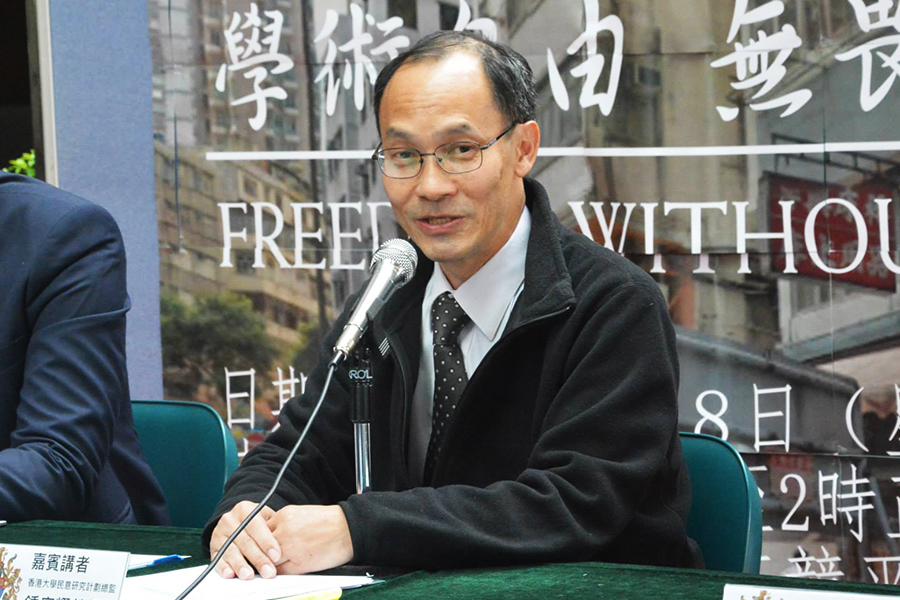
Robert Chung, HKU-POP director
(Ming
Pao,
Sing Tao) June 16, 2015.
Liberal Party's James Tien
commissioned Hong Kong University Public Opinion Programme to interview 5,043
persons on June 5-14.
Q1. Do you support or oppose the
Legislative Council to pass the constitutional reform proposal?
51%: Support
37%: Oppose
Q2. Do you support or oppose the
constitutional reform proposal?
48%: Support
38%: Oppose
(Wikipedia)
Bhutan: a landlocked country in South Asia at the eastern end of the Himalayas.
It is bordered on the north by China and to the south, east and west by India.
The 2012 population was estimated to be 742,737 (165th in the world).
(Oriental
Daily)
In 1982, Bhutan played its first
international soccer match and lost 1:3 to Nepal. In 2000, they lost 0:20 to
Kuwait for its biggest lost in history. In 2002, number 202 ranked Bhutan won
its first international match against lowest-ranked
Monserrat
by 4:0. This was made into a documentary <The Other Final> for an event other
than the Brazil-Germany FIFA World Cup final.
In 2015, Bhutan was ranked number
209 when it played Sri Lanka in the first round of the FIFA World Cup in Colombo
on March 12. To everyone's surprise, Bhutan won by 1:0. After the victory, the
team set off to KFC to celebrate. Bhutan also won the return match 2:1 in
Thimphu on March 17.
Frankly, Bhutan has a population
of just over 700,000. Its people do not like soccer much. It has no professional
soccer players. Therefore the conditions are not favorable to the development of
the sport of soccer.
In the second qualifying round of
the 2018 FIFA World Cup,
Asia Group C has these teams: Bhutan, China, Hong Kong, Maldives and
Qatar.
For these matches, the China
Football Association designed a series of posters about their opponents.
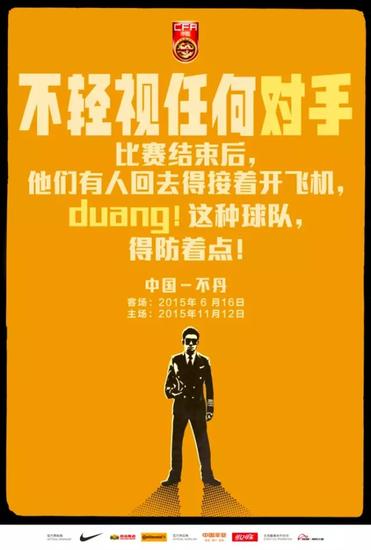
Do not underestimate any opponent
After the match is over, some of them will return to operate an airplane,
duang!
Against a team like this, better be careful!
China-Bhutan
Away: 2015 June 16
Home: 2015 November 12
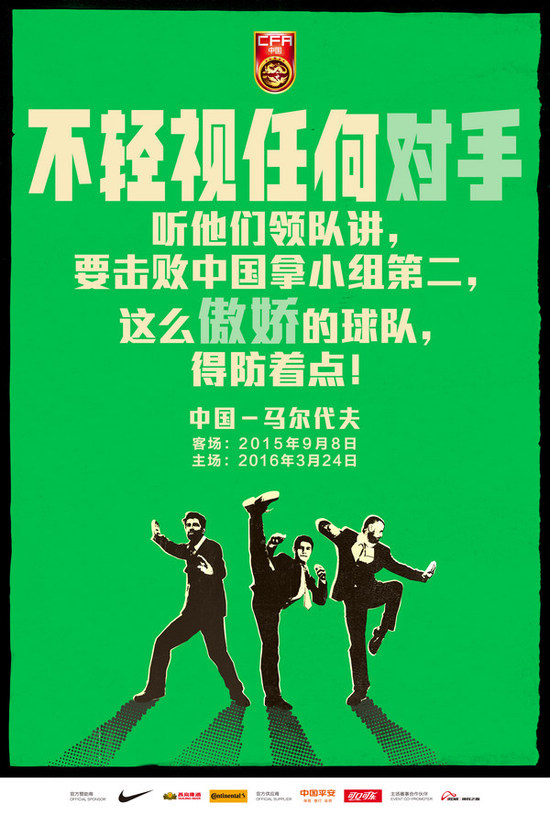
Do not underestimate any opponent
According to their manager, they want to beat and China and take second place in
the group
Against a coy team like this, better be careful
China-Maldives
Away: 2015 September 8
Home: 2016 March 24
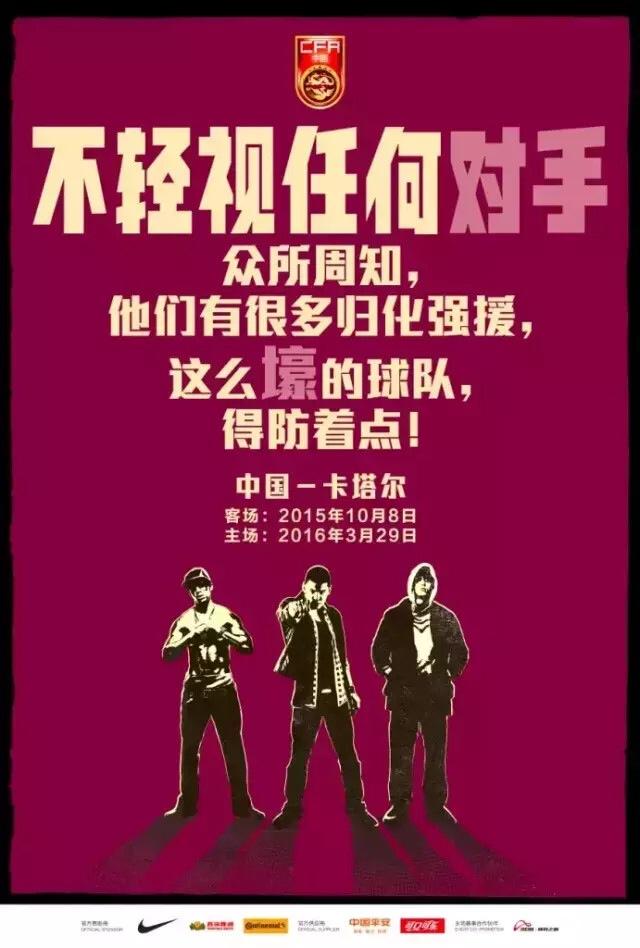
Do not underestimate any opponent
As everybody knows, they have many naturalized reinforcements
Against a deep-pocketed team like this, better be careful!
China-Qatar
Away: 2015 October 8
Home: 2016 March 29
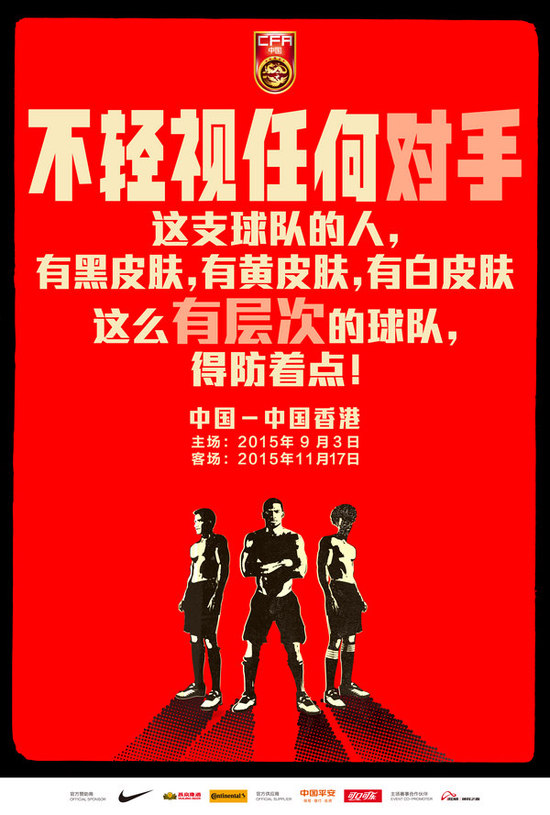
Do not underestimate any opponent
The has black skin, yellow skin and white skin people
Against a diversified team like this, better be careful!
China-Hong Kong (China)
Home: 2015 September 3
Away: 2015 November 17
Video:
China
Football Association promotional film
(SCMP)
Left Field: China FA's odd posters of World Cup opponents backfire. June 13,
2015.
Let's hope China make it to the 2018 World
Cup or else the Chinese Football Association will have a lot of egg on their
face. The CFA mandarins put their foot right in their mouths last week when
releasing a wacky campaign of posters heralding their qualifying group
matches against Hong Kong, Bhutan, Maldives and Qatar. The campaign,
apparently meant to be light-hearted, took a dig at each opponent in a
not-so-subtle way.
The Hong Kong poster focused on skin colour,
with Chinese fans warned not to underestimate "Hong Kong's black skin,
yellow skin, white skin".
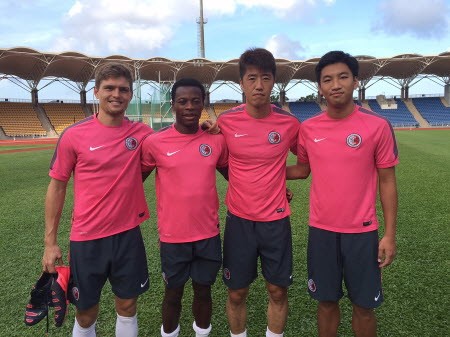
England-born Jaimes McKee, Ghana-born
Christian Anna, mainland-born Bai He and Hong Kong-born Chan Man-fai show
unity.
It gets more bizarre. The Bhutan poster
focused on the captain who is a pilot, saying "after the game someone from
their team will go back to fly a plane".
The dig at Qatar was on their squad of "naturalised
reinforcements", warning fans to be prepared playing against this "wealthy"
side.
The Maldives were labelled "proud" and
"arrogant" simply because the team's coach said he was confident they would
beat China.
But the poster that took the cake was the
racist slant on Hong Kong's mixed team. Half of the 22-strong squad are made
up of naturalised players such as Christian Annan (born in Ghana), Jaimes
McKee (England) and Festus Baise (Nigeria). There are also five players from
the mainland.
They have all earned the right to play for
Hong Kong after living here for seven or more years, becoming permanent
residents and applying for an SAR passport. Their skin colour might be
different, but they are all united in playing for Hong Kong.
If anything, China's attempts seemed only
to fire up the Hong Kong fans, who packed out Mong Kok Stadium for their
match against Bhutan - and booed the China national anthem.
China have qualified for only one World
Cup, in 2002, when Japan and South Korea co-hosted the showpiece. As hosts,
Japan and Korea were given automatic berths, making it easier for China to
grab one of the places given to Asia. It will not be easy this time around
as the last few occasions of qualifying have proven. Asia is given 4.5 slots
at the World Cup - four teams qualify directly with the fifth team going
into a play-off against a team from another confederation.
World Cup qualifying has already begun in
Asia. A total of 12 smaller teams took part in the first round with the top
six progressing into the second round where the likes of Hong Kong and China
are playing. These six, plus another 34 teams, have been drawn into eight
groups of five. And as fate would have it, China drew Hong Kong again.
The eight group winners plus the four best
runners-up will advance to the third round. These 12 teams will be divided
into two groups of six to play home-and-away matches. The top two teams from
each of these groups will book their berth at the 2018 World Cup with the
two third-placed teams entering a play-off, home-and-away, to decide who
will advance to the inter-confederation play-off.
The road is long and hard for China.
Despite being the top-ranked side in the group - 79 in the Fifa rankings -
they must get past Qatar (97th) in their preliminary group, notwithstanding
the fact that Hong Kong (164) could also prove to be a banana skin owing to
the weight of history. Mainlanders remember all too well the night of shame
at the Workers Stadium in Beijing in 1985 when disgruntled fans rioted after
goals from Cheung Chi-tak and Ku Kam-fai gave Hong Kong a 2-1 victory,
knocking China out of the World Cup picture.
The real test will come if China progress
to the next stage of qualifying. But the poster campaign shows they are
nervous and already looking for excuses.
Hong Kong will meet China away in Shenzhen
on September 3 before hosting them in the return tie at Hong Kong Stadium on
November 17. One thing is certain in the mind of Hong Kong Football
Association chief executive Mark Sutcliffe - this campaign will be a
catalyst for a full house at So Kon Po.
"This is a bizarre campaign. Still, it
seems to be generating a lot of media noise and that's great for promoting
the matches," Sutcliffe said. He believed the whole "skin-colour" theme was
meant tongue-in-cheek and the CFA was not being racist.
Let's hope that is the case.
(EJinsight)
When politics transcend sports. June 12, 2015.
Did a group of Hong Kong fans go over the line when they booed the Chinese
national anthem during a football match? The
answer is yes, judging by the fierce reaction on China’s social media.
Mainland netizens are calling Hongkongers traitors and British lap dogs,
among other choice words.Whether or not they are justified to blame the
whole of Hong Kong for the actions of several thousand football fans is not
nearly as controversial as what prompted the behavior.
Apparently, the booing was spontaneous, with about 6,000 Hongkongers rising
in unison and mocking the national anthem for its duration. The incident
happened on Thursday when the Hong Kong side was introduced for its World
Cup qualifier against Bhutan.
This
is worth noting because Hong Kong hosts China in November after playing the
mainland side in Beijing in September.
Perhaps no one expects another embarrassment to China but it could happen
because this is not remotely about sports, where such provocative displays
are frowned upon, but about worsening cross-border relations.
(SCMP)
China soccer fans furious as thousands of Hong Kong supporters boo national
anthem. June 12, 2015.
Hong Kong and China’s World Cup qualifying
match-ups look set to be even more heated affairs after mainland netizens
reacted angrily to footage of a packed Mong Kok stadium booing the national
anthem before Thursday night’s 7-0 win over Bhutan. Given the political
situation in the SAR, the games – in Shenzhen in September and Hong Kong in
November – between “big brother” and “little brother” were already set to be
the stage for fierce rivalry.
A 6,300-strong full house – many suggested
fans were motivated to attend by that poster – watched Hong Kong thrash the
Himalayan minnows in the opening group C match, some displaying banners such
as “HK till I die” and “Hong Kong Power”.
But judging from online reaction, fans on
the mainland who watched the game on CCTV were far from impressed to hear
the majority of the crowd boo the March of the Volunteers before the game.
While the crowd remained silent and respectful for the Bhutan anthem, they
erupted in jeers and boos for China’s.
Mainland reporters who went to Hong Kong to
cover the match as preparation for China v Bhutan on Tuesday were astonished
at the fans’ reaction, and many netizens reacted angrily.
One fan from Guilin commented on Sina
Sports, “Hong Kong people gave an insult to the national anthem, team China
must do a good job” while another from Gansu recommended nothing less than
immediate invasion, saying “Hong Kong is nothing, just destroy it”. Others
blamed the Hong Kong education system, saying “there were problems with Hong
Kong education a decade ago and those born in the 1990s do not know anything
about patriotism and never be thankful”. Another comment from Guangdong
simply said “get out, Hong Kong separatists” while another said he “looked
forward to see team China beat Hong Kong 7-0”.
On Weibo, the tone was much the same. "Even
if you have no good feeling for the country, the country has done nothing
bad so that you need to boo the national anthem. There should be a basic
respect," wrote one commenter "If we are not from the same family, why
should we move into the same house? It would be better we say goodbye to
each other," said another. "Go ahead! so that our people can understand the
real Hong Kong," said another.
Hong Kong face the Maldives on Tuesday,
with the match already sold-out, then don’t play again until the September 3
showdown against China. Hong Kong Football Association chairman Brian Leung
Hung-tak was worried a similar situation may occur at Hong Kong’s second
qualifying match against Maldives at Mong Kok Stadium on Tuesday, but
admitted it would be difficult to stop the fans. “We can only urge them not
to do so,” he said.
“We should respect any national anthem, not
just China’s,” said Leung. “This is a basic requirement in a civil society.
More importantly, we are in Hong Kong and this is part of China. The fans’
reaction to the national anthem is intolerable. I know there are people who
dislike China but we were attending a sports event and should have at least
the sportsmanship of respecting others.”
Two years ago, Hong Kong fans booed the
Philippine national anthem and were accused of making racist and
discriminatory comments. FIFA fined the HKFA 30,000 Swiss francs
(HK$256,000).
Video:
Hong
Kong fans booing Chinese national anthem
Video:
Hong
Kong beat Bhutan by 7:0.
Internet comments:
- On November 17 2015, Hong Kong will be
the home team against China. Eleven years ago on the same day, China was
home to Hong Kong and won 7:0. Unfortunately, China failed to qualify by one
goal due to goal differentials, and Kuwait advanced instead.
- Counter poster made by the Hong Kong
Football Association:
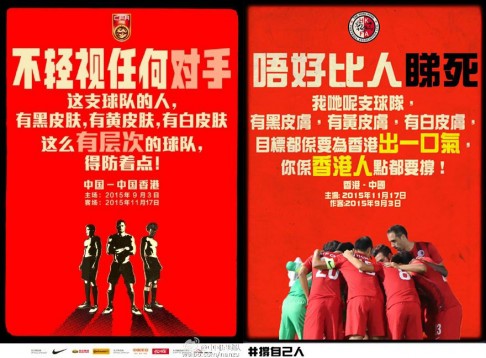
Don't let other people look down on you
Our soccer team has black skin, yellow skin and white skin
The goal is the same to fight for Hong Kong
You are Hongkongers so you must give us support!
Hong Kong-China
Home: 2015 November 17
Away: 2015 September 3
- According to the Localists, FIFA lists
the team as 'Hong Kong' and not 'Hong Kong (China)'. This meant to them that
FIFA accepts Hong Kong as a sovereign nation. Well, if so, then why is the
national anthem of Hong Kong the same as the
People's Republic of China national anthem?
- Hong Kong is as sovereign as Scotland, Wales and Northern Ireland. FIFA
has a special statute permitting "regions which have not gained
independence" to apply for membership separately with the permission
of their parent countries (emphasis added). Puerto Rico, Hong
Kong and the Faroe Islands are all FIFA members under this regulation. This
also helped FIFA to sidestep certain political issues by admitting Taiwan
and Palestine as members without addressing the issue of whether they are
independent nations.
- This match was broadcast on CCTV 5 in
mainland China. What do you think that it does for the people of Hong Kong?
Adoration? Admiration? Contempt? Disgust?
- Do you think that this will make the people of China more supportive of
the "democratic aspirations" of the "people of Hong Kong"?
- What is so big deal about foreign-born
players being on national teams? 78 out 736 players at the 2014 World Cup
were foreign born.
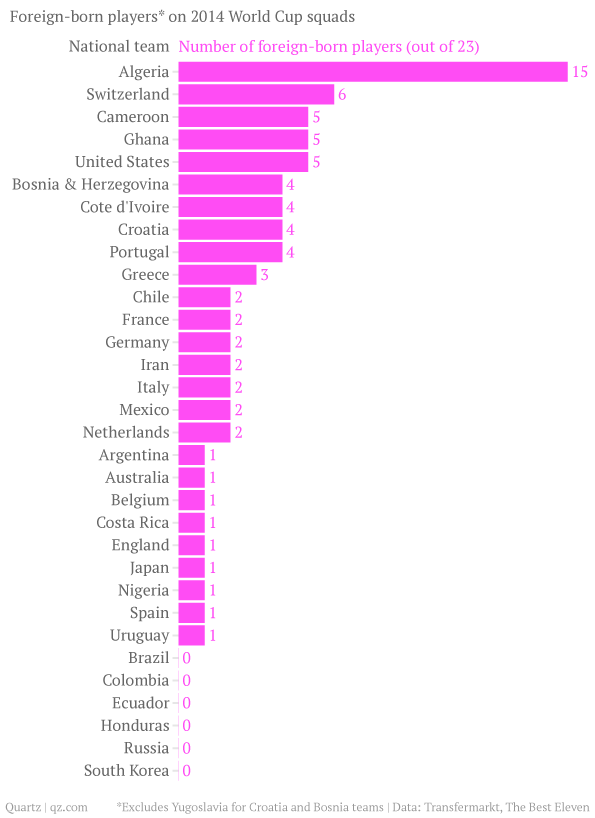
- Why is it racist to say that the Hong
Kong team is diversified and have people with different skin colors? This is
a statement of fact. No value judgment is implied.
- What might happen when Hong Kong plays
China later this year?
First game on September 3 in China: Will the Hong Kong away fans boo during the
national anthem? Will the Hong Kong valiant warriors travel to China and
open yellow umbrellas? Will
Captain America show up and hoist the British Dragon/Lion flag for
Hong Kong independence? Apparently, the mainland fans are already organizing
to beat the crap of anyone who does any such thing.
Second game on November 17 in Hong Kong: Will Hong Kong Localism Power
administer flying kicks to the bus carrying the Chinese national team? Will
Joshua Wong cross his arms and turn his back on the national flag during the
singing of the national anthem? Will Apple Daily distribute yellow umbrellas
at the entrance for a mass photograph opportunity? Will the mainland away fans
boo the Hong Kong national anthem? Or will they play the national anthem
just once with both flags flying?
- They already have the British Dragon/Lion
flag for Hong Kong independence. Now they need a national anthem for the
Hong Kong City-State. Quick, there must be a talented musician somewhere to
do just this! This is your chance to become the
Francis Scott Key of Hong Kong.
- Don't be lazy and tell me
God
Save The Queen will suffice.
- As Chip Tsao says, when there is a superior item out there, there is no
need to find an inferior substitute.
- The national anthem for the Hong Kong City-State is clearly going to be
<Raise the Umbrella>. Here is
Denise
Ho's soulful rendition. This is absolutely the greatest song ever.
The song itself is inspiration enough to create a new sovereign nation.
- I vote for Verdi's
Va
Pensiero. The song was intended for Italian patriots seeking to free
it from foreign control. It has been proposed as the national anthem of
Padania in the even that it secedes from Italy, which is a similar situation
with Hong Kong.
- Wrong! The official theme song for Occupy Central is
Happy
Birthday! Every time anyone sings the song anywhere in the world,
they will be singing Hong Kong's national anthem.
- Is FIFA going to fine the Hong Kong
Football Association because the home country
fans booed their own national anthem? That's an interesting
proposition. It is not an automatic NO, because the reason why FIFA imposes
such fines is that they won't allow politics to get into football and this
case is clearly political.
- Soccer brings out the worst in
nationalism. This is a case of Chinese dogs vs. Hong Kong pigs. This is
unsavory.
- So far I see no discussion of the
problems in Hong Kong football.
Are you aware that once upon a time in the 1950's and 1960's, Hong Kong was
a major power in Asian football? The best Hong Kong semi-pro local-born
soccer players played for the Republic of China team, being Hong Kong
citizens (of Chinese descent). The People's Republic of China was not yet a
FIFA member. Another team of second-tier players represented Hong Kong, and
that team includes some foreign-born amateur players as well as some Hongkongers who cannot represent a foreign country (e.g. Hong Kong police
officers who pledged allegiance to the Queen of England). Then the whole setup collapsed in the 1970's as big corporate
money came in and third- and fourth-tier foreign reinforcements arrived to
dominate. Today the situation is as noted by the CFA poster: half of the
Hong Kong team is imported (mostly from Europe, Africa and mainland China)
and naturalized after seven years of residency. This is addictive because it
insures some level of success but it is unsustainable and even detrimental for native Hong Kong
football. Of all people, the Localist/Nativist/Indigenous movement must know
that.
This Hong Kong-China rivalry is obscuring the real question: Where is
Hong Kong football heading?
- Video:
https://www.youtube.com/watch?v=_T1ZMAhUy_8 Hong Kong versus
Maldives on June 16, 2015. Was there booing of the national anthem?
Q1.
Do you support or oppose the government’s
proposal on CE election of 2017?
56.8%: Support
33.8%: Oppose
This poll is based upon the
three-university rolling poll. The survey
question is identical, but the survey outcomes are different. That could due to
design differences.
First of all, this poll is
designed for people who are busy and work long hours. So the entire interview
lasts one minute, unlike the long omnibus telephone interviews that the
universities conduct.
Secondly, the three universities
use home telephone numbers, which restricts the coverage. Hong Kong has the
higher mobile telephone penetration in the world (7.3 million persons owning
more than 10 million mobile phone numbers), so that many people no longer have
home telephones. This poll uses randomly generated mobile phone numbers
(prefixes 5, 6 and 9) and expands the coverage.
Here is one incident as reported
by three different newspapers.
(Apple
Daily)
Yesterday evening in Mong Kok
district, a young woman was slashed in the neck. According to eyewitnesses, the
male suspect held a 6-inch-long fruit knife and was ready to stab the female
friend of the victim. He failed. There was an argument. The suspect punched the
friend. When he tried to stab the friend again, he mistakenly stabbed the victim
instead.
According to the police, the
suspect is a 20-year-old man and the 21-year-old female friend of the victim is
his girlfriend. The female friend is a business student at City University.
The male suspect is active on
Facebook, as he kept forwarding funny videos from around the world. In 2014, he
wrote: "I am thinking about the baby pig, ha ha." Soon after that, there was
probably some emotional turmoil in his life. He wrote: "The wrong love is an
inevitable medicine," "No energy left to love people," "short pain is better
than long pain", etc.
(Oriental
Daily)
A 20-year-old man recently left
his direct sales job and hated his 31-year-old female co-worker named Wong for
causing division between him and his 21-year-old City University student
girlfriend.
At around 630pm, the male suspect
learned that his girlfriend was out with the female co-worker in Mong Kok, so he
brought two knives in order to set an ambush on Argyle Street. He took out a
5-inch-long fruit knife and attacked. Wong was slashed on the left side of her
neck, and blood came gushing out. The male suspect stood there with blood on his
hands and continued to play with his mobile phone. He was surrounded and subdued
by heroic citizens and turned over to the police. The girlfriend was in shock.
According to eyewitnesses, the
male suspect pulled out the knife and immediately attacked Wong without saying a
word. Wong was slashed on the left neck. Fortunately an emergency aid worker
passed by after work and immediately rushed over to stop the blood flow. Workers
in a dispensary brought out bandage to help.
(Sing
Tao)
A 20-year-old direct salesman
named Ho felt that a female co-worker named Wong was targeting and stopping him
from getting to know the 21-year-old female co-worker named Tang. Furthermore, Wong
was derailing everything he was doing at the company. Yesterday evening after
leaving work, Wong, Tang and another female co-worker were walking around Mong Kok. So Ho followed the co-worker to Mong Kok. As they walked along Argyle
Street down near Sai Yee Street, Ho took out a knife, rushed over and slashed
the artery on Wong's left neck. Afterwards, he stood on the side and played with
his mobile phone until he was arrested. With the massive bleeding, Wong was
slowly fading away. Fortunately, a emergency aid worker passed by and stopped
the bleeding. She was taken to Queen Elizabeth Hospital for treatment and she is
in a serious condition.
Internet comments:
- In Hong Kong, reporters =
fiction writers.
- In Hong Kong, a news report =
10% hearsay, 20% photos from Internet users, 70% imagination running wild.
- It's one thing to say that the
truth = the sum total of the parts. But the parts are contradictory with each
other. Somebody is wrong here. But who?
- Well, they all agree on the fact that a woman was slashed by a man. But that
isn't much of a news story, is it?
- Hey, you better not make any
criticism because that would be an assault on the inviolable freedom of press.
- A friend of mine works for a
newspaper. He said that most of the time, the reporters don't know what
happened. They just ask the reporters from other newspapers who seemed to know.
But they can't report the identical thing, so they create or change some
details. Reporters from competitive newspapers actually help each other
(including sharing photographs) because today others want you to help them and
tomorrow you may need help from them. Better to build good relationships than
become a pariah.
- Dear Journalists Association,
stop spending so much time on defending the freedom of press and start paying
attention to professionalism and code of ethics.
- They can't even agree on the
length of the knife, much less the personal histories of the principals.
- With newspapers like these, no
wonder I keep losing money at the racetrack based upon their betting tips and
information.
- Well, what did you expect? There are 14 entrants in a horse race, and they
have two dozen experts and every horse gets picked by someone or the other. So
the next day, they can tout how they picked all the race winners.
- You can't trust the newspapers,
but you can trust the social media. Exclusive news: The male suspect has been
ferreted out as a Yellow Ribbon!
- Lousy fiction writing. Here is
my better version: The 31-year-old woman is a mainlander who has managed to
entice the 21-year-old City University woman to quit the Umbrella Revolution and get a
real job at an up-and-coming company. The 20-year-old man tried to infiltrate
the company to win the girl, but is obstructed and persecuted by the 31-year-old
woman in every which way. Therefore, he decided to get valiant and administer
justice to the treacherous female mainland locust. Now isn't this story a lot
more interesting, with the entire Mainland-Hong Kong conflict as the backdrop?
- No, the above piece of fiction
is only good for Passion Times. I have a better Apple Daily 'leftard' version: The
20-year-old man just immigrated from the mainland on a one-way-visa three years
ago. Because he hardly spoke any Cantonese, he could not attend school and so he
got a job as a janitor at a direct sales company. There, he fell in love with a
21-year-old City University female intern. However, the 31-year-old company
female employee told him to stick to his job cleaning the toilets and stop
bothering the other employees. So the man got upset and committed the dastardly
act. Now isn't this a lot more interesting, with the entire evilness of
mainlander as the backdrop?
- I don't care about any of this.
I only want to send my best wishes to the slashing victim. May she recover well
at the hospital.

(Apple
Daily)

The rolling poll by the three
universities showed that the support and oppose rates are both 42.8%. Thus,
Beijing can no longer hope to use public opinion to force the pan-democrat
legislators to switch their votes. According to an informed person, President Xi
Jinping had called a stop to enticing the pan-democrat legislators because he
wanted a rule-of-law. But as public opinion reversed on the constitutional
reform, the targeted legislators are being approached again.
According to this informed person
who quotes a legislator who does not want to divulge his identity, that
legislator went to his club to swim and encountered a 'friend' whom he has not
seen for a long time. During the conversation, that individual said that there
is underground betting in Macau on whether the constitutional reform proposal
will be passed. The individual suggested that the legislator make a bet on the
passage. The legislator got wary and told that individual: "Please do not talk
to me about this. I don't want to listen to this." Afterwards, he thought that
this middleman did not run into him by accident, and that he probably used the
underground betting as a pretext to get him to switch his vote in return for a
big 'payout.' This informed source then cited his own sources that Beijing was
reported to be offering $300 million dollars per vote. "As long as you are
willing to press the button (and vote YES), you can pocket the money no matter
whether the proposal is passed or not."
Our reporters spoke to many
pan-democrats about this rumor of money offer. League of Social Democrats
legislator Chan Wai-yip confirmed that he has heard about money being offered to
switch votes. "Actually, someone was saying that three weeks ago already." Chan
said that the central government's money offer was "very significant." He cited
another legislator who said that a middleman representing the Chinese government
making contact. "Some people said that the offer was $100 million. I don't know
if that is truthful or just a joke." However, that other legislator claimed that
the money offer was real.
Chan also said that various people
have tested him out in the past two to three weeks. He frankly said that someone
had indirectly made him an offer. "It is inconvenient for me to say too much. At
the present stage, when the other side made are making various offers, it can be
very attractive. It will be attractive to anyone in politics." But Chan said
that he will veto the proposal, because it was wrong and would destroy democracy
in Hong Kong.
According to People Power
legislator Chan Chi-chuen, middlemen have tried to learn more about his
position, but nobody has made him any offers. But he has heard some legislator
claim that the central government "wants him to name his price, but it is not
known whether that is a fact or a joke." Chan emphasized that he will veto the
bill.
Civic Party legislator Ronny Tong
Ka-wah said that nobody has made him any offer to pass the proposal. He said
that he will veto unless the central government promises to make a huge
turnaround on the proposal (such as promising to eliminate the functional
constituencies in the legislative council).
Neighborhood Workers Service
Council legislator Leung Yiu-chung, independent legislator Raymond Wong Yuk-man,
Health Services sector legislator Joseph Lee Lok-long, ADPL legislator Frederick
Fung Kin-kee, Legal sector legislator Dennis Kwok Wing-hang and Information
Technology sector legislator Charles Mok said nobody has made them any offers
and that they will veto the proposal. Raymond Wong said: "I wouldn't reverse my
vote even if an offer exists, but there is none." Charles Mok said, "If I wanted
to switch votes, I would have done it already" and "not after public opinion has
switched." Joseph Lee said that Health and Environment Department secretary Ko
Wing-man has met with him to lobby for his vote, but Lee repeated that he will
veto the proposal. Accountancy legislator Kenneth Leung Kai-cheong has not yet
responded to our inquiries.
(Sing
Tao)
League of Social Democrats
legislator Chan Wai-yip said that two to three weeks ago a middleman offered
more than $100 million to some pan-democrat legislators that he knows well to
support the constitutional reform proposal. But Chan said that he will not go
and make a denunciation at the ICAC, because it is hard to produce evidence for
these allegations. For example, he has denounced the past two Chief Executives,
but nothing has come out of it yet.
Democratic Party legislator Sin
Chung-kai: In mainland China, they are talking about the rule-or-law, so it is
not credible that they want to buy votes. "Even if you hate the Communists, you
shouldn't manufacture rumors against them."
Information Technology sector
legislator Charles Mok: I haven't heard about these stories, and nobody has
offered me anything. You can have my vote for free if you remove the August 31st
framework (of the National People's Congress Standing Committee).
Accountancy sector legislator
Kenneth Leung: The reason why such stories are being circulated now is to shake
up the confidence of the pan-democrats. "Previously, they were talking about
$100 million. Now they are talking about $300 million. Next week they may be
talking about $600 million."
Civic Party legislator Claudia Mo:
Anyone who switches their vote should commit suicide! The rumors about the
central government offering money now is a systematic smear job so that people
will think that the "pan-democrats carry price tags around their necks."
(SCMP)
CY Leung laughs off report Beijing will offer pan-democrats HK$300m bribe to
back reform. June 11, 2015.
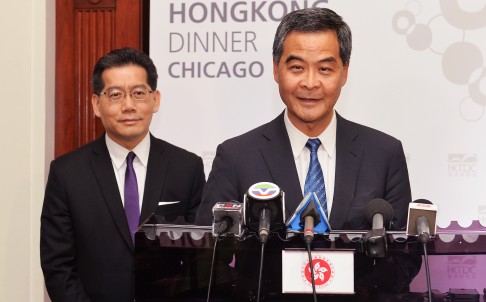
Chief Executive Leung Chun-ying
this morning laughed off reports suggesting Beijing could use as much as HK$300
million to bribe pan-democratic lawmakers to vote for the reform package to be
scrutinised next week. Speaking in Chicago, Leung brushed aside the accusations
as he said everyone could judge the report “based on common sense”.
(Bastille
Post)
According to an authoritative
source, this news story is fiction without any shred of evidence. There is
no $300 million offer. There isn't even a $30,000 offer. The fundamental reason
is that the central government would never engage in any law-breaking activity.
This source also said that the constitutional reform is a legal as well as
political issue, and the central government never handles political matters in
such an unserious manner.
This authoritative source guesses
that this story is making an appearance now for obvious reasons. First of all,
this false information is designed to influence public opinion. Citizens may
think that the central government is low-and-dirty in buying votes and therefore
oppose the proposal. Secondly, it is designed to cement the pan-democrat votes,
because anyone who switches vote now will be suspected to have pocketed $300
million.
Internet comments:
- Where did the Apple Daily
reporters learn their journalism? Which school failed to teach them the
Five Ws:
The Five Ws, Five Ws and one H, or the
Six Ws are questions whose answers are considered basic in
information-gathering. They are often mentioned in journalism, research,
and police investigations. They constitute a formula for getting the
complete story on a subject. According to the principle of the Five Ws, a
report can only be considered complete if it answers these questions:
- Who did that?
- What happened?
- When did it take place?
- Where did it take place?
- Why did that happen?
Each question should have a factual
answer — facts necessary to include for a report to be considered
complete. Importantly, none of these questions can be answered with a
simple "yes" or "no".
If this is a true story, it would
be the single most important evidence so far of central government meddling in
Hong Kong affairs. But now the story limps out in a whimper. Who? What? When?
Where? Why? None of these questions are answered.
- Finally someone came up with two
and a half W's: (RTHK)
June 13, 2015.
League of Social Democrats lawmaker Leung
Kwok-hung says that "a middleman" offered to give him
$100 million if he
voted in support of the government's political reform proposal. He said he
rejected the offer immediately and felt angry that there have been rumours
he had been bribed. But he said he did not know whether the middleman is
connected to the Beijing government.
New People's Party chairwoman Regina Ip
said she doesn't believe Beijing would try to bribe any of the
pan-democrats. The Liberal Party's James Tien, said he believed Mr Leung's
allegation. However, he didn't think "the middleman" was sent by the Hong
Kong government or Beijing.
Lawmakers will vote on the proposal on
Wednesday. The pan-democrats are expected to veto the plan as they say it
fails to meet international standards for democracy.
Leung said that someone offered
him $100 million. That was what happened. He said that the offer was for him to
switch his vote. That was why it happened. He said that he was offered, so that
was half of the Who. But he didn't name the other party, only that he didn't
know if this was a Beijing person. He did not say when. He did not say where.
James Tien said that he believed
Mr Leung's allegation. However he didn't think "the middleman" was sent by the
Hong Kong government or Beijing. So which other party goes around offering $100
million then?
- Leung Kwok-hung is worth $100
million? Maybe 100 million sperm cells.
- Leung Kwok-hung is the witness to a major crime, but he won't name the
criminal. If Leung reports the case to the ICAC and the case is successfully
prosecuted, it will be the greatest guarantee that the central government will
never meddle in Hong Kong politics again. But Leung won't. Why?
- Because Leung Kwok-hung won't name names, it is assumed that he made it up.
- Leung Kwok-hung declined comment when emails by Mark Simon to Jimmy Lai
indicated that $500,000 was sent to Leung. But now Leung is on radio talking
about this other matter.
- Jimmy Lai paid Leung Kwok-hung $500,000 previously for his votes, so now he
turns down $100 million?
- How much did Jimmy Lai pay Leung Kwok-hung to go on radio and tell this story?
- If this actually took place, it would have been front page news on Apple
Daily/Next Weekly for days already.
- Only four pan-democrat votes are needed, but Leung Kwok-hung, Chan Wai-yip and
Raymond Wong are the least likely of bribery targets. Giving him $100 million is
only going to allow him to fund more anti-Communist activities in Hong Kong.
- If the central government has $100 million to spend, it would have been far
easier to sub-contract through multiple layers to arrange for an 'accident' to
occur to Leung Kwok-hung and work on a more malleable replacement.
- I hereby increase my offer to
$10 billion to Leung Kwok-hung. I put my
money
where my mouth is:
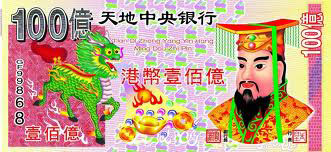
Vote AYE and this money shall be his.
- Who loses if the 2017 Chief
Executive election proposal fails to pass? Here is the current thinking:
(1) the people of Hong Kong because the Chief Executive will be elected by
1200-person election committee again in 2017, CY Leung will most likely be
re-elected and they won't get one-person-one-vote for at least another decade.
(2) the pan-democrat legislators because they can't explain why electing the
Chief Executive by 1200-person election committee members is better than
one-person-one-vote and they face re-election in 2016.
(3) the central government suffers a loss of face, but nothing else really.
(4) the Hong Kong SAR government suffers nothing really because it is just the
go-between.
So why does the central government need to bribe anyone? They seemed to be
better off with failure to pass the proposal.
- If the central government has
such largesse, they would be offering multiples of $100 million to people like
the Dalai Lama and Rebiya Kadeer.
- (Bastille
Post)
I don't like to harp about what
media colleagues have to say, but when I saw the headline news <Middleman
offered $300 million to entice legislators to vote>, I couldn't restrain myself.
$300 million? Are you stupid?
... Although the story seemed
concrete, further reflection will lead you to conclude that it is very much
untrue.
Firstly, the whole story contains
no evidence. It quotes Chan Wai-yip who heard another legislator say something.
Nobody knows who this other legislator is. Under the law, this is known as
hearsay and not admissible as evidence.
Secondly, why should the central
government pay $100 million to buy one vote? If it is willing to do everything
possible to pass the bill, it would never be so firm and stubborn and allow the
pan-democrats no room whatsoever to switch positions.
Thirdly, any legislator who
accepts the bribe won't be able to enjoy it in Hong Kong. The Prevention of
Bribery Ordinance applies to all public officials (including legislative
councilors). It is a crime just for the wealth of a public official not being
commensurate with the income. What can the legislator do with the $300 million?
He can't deposit it in a bank. He can't use it in large amounts (e.g. buying
apartments). He can only keep it under his bed. Or he can flee overseas to some
place without an extradition treaty. So the conclusion is that nobody will make
such an offer and nobody will take such an offer even if made.
... The more I think about it, the
crazier I thought this story was. I was naive enough to think that nobody could
possibly believe this. But a friend told me that at the restaurant, many people
were discussing this story. Some people denounced the central government
while others said "It's great to be a legislator because you are made for life
with one vote!" So many people believed the $300 million bribe story. When lies
get repeated often enough, people start to believe it.
- According to Leung Kwok-hung, he
said that this individual probably had a big boss behind him with the money.
Leung told the individual that he didn't want to see him again. Leung definitely
knows this individual, even the big boss. The relevant statue is Section 4 of
the
CAP 201 Prevention of Bribery Ordinance:

The individual and his boss are both guilty of committing this offense. As an
elected public servant, Leung Kwok-hung has the legal and moral responsibility
of immediately denouncing these individuals to the Independent Commission
Against Corruption for attempting to make the largest bribery in the entire
known history of Hong Kong.
- Leung Kwok-hung is a
publicity hound. Right now he is doing the rounds on the talk shows
about the Bribe of the Century. Of course, he knows that the publicity value
would be a whole lot greater all around the world if he went to the ICAC and
make the formal denunciation. For example, American politicians would be so
jealous (see
List of American politicians convicted of crimes) because none of them
ever got any offer close to the now legendary $100 million. To the extent that
Leung won't go to the ICAC, it means that he had no evidence.
- Ah, finally the truth comes out.
(Bastille
Post) June 14, 2015.
Yesterday, Leung Kwok-hun claimed
that someone approached him and offered him $100 million to support the
constitutional reform bill. He said: "His boss wanted a vote, so he approached
me. I told him that I don't want to see him again and I won't want to listen to
what he has to say." He continued: "It is rumored that I took money and I am
going to switch my vote! Let me tell you: Please have some integrity even if you
have to lie!"
Today the South China Morning Post
said that they contacted Leung Kwok-hung later and Leung told them that he made
up the $100 million figure to attract media attention. At around noon, RTHK also
reported that Leung admitted that the $100 million bribe was fictional.
During the RTHK interview, he said
that he made up the dollar amount. But it was true that a middleman contacted
him in February. There was no mention of any dollar amount. The middleman wanted
him to come up with a money figure that will guarantee that he will never have
to worry about money again.
According to RTHK, Leung explained
that if he didn't use the $100 million figure, no media outlet would report what
he said. Leung refused to be recorded during this interview.
- (dbc)
https://www.youtube.com/watch?v=zgYsaOCvKEE CY Leung, Leung Kwok-hung.
- So Leung Kwok-hung jerked the
media around and then heaped scorn upon them ("They wouldn't report this if I
didn't make up the $100 million figure. They're like that"). Where is the Hong
Kong Journalists Association when we need them to defend the profession?
- The "If I didn't say _______,
the media would never report it."
--- If I didn't say that 2,000 students were massacred on Tiananmen Square, the
media would never report it.
--- If I didn't say that 530,000 persons marched on July 1st 2004, the media
would never report it.
--- If I didn't say that 41% support and 43% oppose the 2017 Chief Executive
election proposal, the media would never report it.
(...)
- am730 news story (see
Pinocchio):
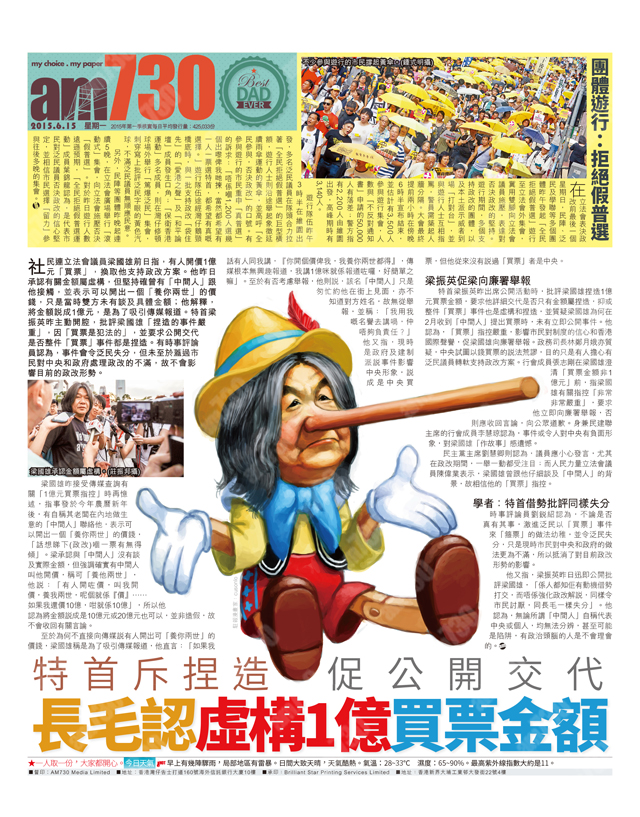

(Speakout
HK)
Chief Executive Office information
coordinator Andrew Fung Wai-kwong wrote to Apple Daily chief editor Chan Pui-man
today about an editorial stating: "(Chief Executive) CY Leung also encouraged
certain organizations to charge violently att peaceful Occupy students and
citizens, causing many injuries." Fung said that the allegations were "extremely
serious but also baseless." Therefore the editorial writer Lu Feng and Apple
Daily should provide the facts and explain to the public how CY Leung encouraged
which organizations to "violently charge at peaceful Occupy students and
citizens, causing many injuries" where and when. Fung said that Leung reserves
the right to pursue the matter.
Lu Fung responded: "He (CY Leung)
did not condemn the attackers and did not take measures to effective eliminate
those attacks. So he can be said to be tacitly encouraging them." In addition
with respect to Leung reserving his rights, Lu said: "The risks in writing
political commentary are higher than before. I am not the first and I am afraid
that I won't be the last to be held accountable." He emphasized that he will
treat this matter in normal fashion.
Chief Editor Chan Pui-man also
responded: "Apple Daily is a platform for open expression. We welcome any
individual, organization or government official to correct the contents in our
newspaper. Lu Feng has provided an adequate response to information coordinator
Fung. As for what Fung said about 'Mr. Leung reserving the right to pursue the
matter,' we hope that the Chief Executive can explain specifically what he
meant. We believe that the senior government officials who hold high powers
should not be issuing threatening or seemingly threatening words or actions
against news organizations and news workers. Otherwise this may affect the space
for free speech in Hong Kong and its core values."
Chan recommended Fung read this
verdict: "It is of the highest public importance that a democratically elected
governmental body, or indeed any governmental body, should be open to
uninhibited public criticism. The threat of a civil action for defamation must
inevitably have an inhibiting effect on freedom of speech."
Internet comments:
- I recommend Andrew Fung to read
George Bernard Shaw: "I learned long ago, never to wrestle with a pig. You get
dirty, and besides, the pig likes it."
- Theorem (according to Apple
Daily): Any time that the Chief Executive does not condemn any crime or take
measures to stop it from recurring, then he is tacitly encouraging it.
Let's apply the theorem to the
Apple Daily news section on this day:
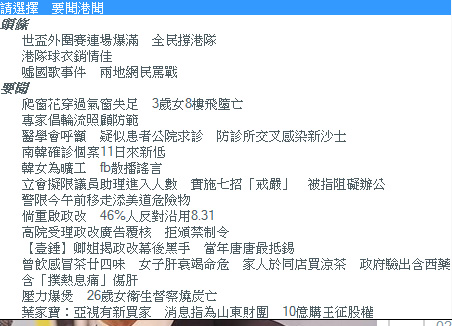
Item: Hong Kong fans booed national
anthem in World Cup qualifying match against Bhutan. Since CY Leung did not
condemn this, he is tacitly encouraging it.
Item: 3-year-old crawled though
window and fell to death from eighth floor. Since CY Leung did not condemn this,
he is tacitly encouraging it.
Item: Korean woman used Facebook
to spread MERS rumor because she didn't feel like going to work that day. Since CY Leung
did not condemn this, he is tacitly encouraging it.
Item: Police set noon deadline to
remove dangerous materials on Tim Mei Avenue. Since CY Leung did not condemn this,
he is tacitly encouraging it.
Item: 46% oppose August 31st
framework if and when constitutional reform is re-started. Since CY Leung did
not condemn this, he is encouraging it.
Item: Woman died from kidney
failure after drinking Panadol-laced herbal tea. Since CY Leung did not condemn
this, he is tacitly encouraging it.
Item: 26-year-old female hygiene
inspector commits suicide due to work-related pressures. Since CY Leung did not
condemn this, he is tacitly encouraging it.

(NOW
TV)
A number of newsstands in
Mong Kok posted notices today that they are not selling Next Weekly anymore.
According to the Newsvendors Alliance, they receive their copies from Next Media
at $16 per copy when the list price is $20. In Mong Kok, the convenience stores
such as 7-Eleven and Circle K sell them at the cover prices, and some newsstands
sell them at discount ($19 or even $18). However, the convenience store chain
759 is now selling their copies at $14 per copy. At that price, there is
no way for the newsstand to compete. Therefore, the newsstands are now on strike
against Nexts Weekly.
(Apple
Daily)
According to Next Weekly chief
editor Lee Chi-ho, they have made no promotional agreements with 759. On the
current issue of Next Weekly, they have only shipped several hundred copies to
759 which is getting it at a price higher than what the newsstands are paying.
Lee said that 759 makes the decision on pricing, and that the boycott would have
a huge impact on sales.
At 759, the list price for Next
Weekly was $20. During the current sales period, there is a 30% discount so that
the actual price is $14. If the buyer pays with MasterCard PayPass credit card,
there is another 12% discount, so that the net price is only $12.30. According
to Newsvendors Alliance chairman Mr. Liu, "If magazines can be sold at $12.30,
our prospects will be dim. If we don't speak up now ... newsvendors cannot
compete with these big capitalists." Liu said that thee are 400 newsstands
around Hong Kong and they are paying $16 per copy of Next Weekly. There is no
way for them to compete against 759.
(ETnet)
759 chairman Lam Wai-chun
proclaimed that this was just a beautiful misunderstanding. He said that 759 was
testing its delivery system and testing the selling of Next Weekly for three
weeks at 20 stores. "There is no fixed price for Next Weekly, so he intended to
sell at the cover price. But our company was running the 30% discount program,
so it was also applied to the magazine. We have now set the price back to the
original $20."
(Oriental
Daily) June 9, 2015.
On the eve of the vote on the
constitutional reform proposal, there is now a <Resistance Handbook> being
circulated on the Internet. The handbook tells people that they "would rather be
flying ashes than floating dust" and teaches people how to resist the police.
According to information, the Cyber Security and Technology Crime Bureau of the
Hong Kong Police is very interested in the matter.
There are 24 pages in the
handbook. Some "men in black" distributed copies of the handbook at the June 4th
assembly in Hong Kong University. The handbook is also distributed on the
Internet. The cover is based upon "V
for Vendetta" and it says that in such times as these, "Valor is not an
act of desperation, but a meaningful gamble." The handbook teaches people how to
arm themselves and fend off police attacks.
(Speakout
HK on YouTube)
0:05 According to information
today, there are arsenals in the demonstration area outside the Legislative
Council. There are large amounts of wood, nails and glass bottles. It is
frightful to see so many tools.
0:16 A radical organization has uploaded a <Resistance Handbook>. They talk
about bringing a coffin to the demonstration march, setting it on fire and
tossing it at the police. They suggested using flag poles, bamboo rods and iron
bars to charge the police, and also using ropes to pull down the iron barriers
as well as toss fire bombs. Fire bombs, not water bombs. Wow, these guys are
nuts. They want to cause casualties. What is the difference with ISIS?
0:46 Even Internet users are upset and cursed out the poster. "Administrator,
please remember to take your medicine so that your mental impairment does not
worsen." "People are getting rasher." "They are pushing the students out to
die."
1:02 During Occupy Central, they carried shields with nails jutting out. This
time, they may use glass bottles to make fire bombs to toss at the police. Isn't
this the rise of terrorism? This is extremely dangerous to our society and our
children as they grow up. Worse yet, some people tell young people to charge
while they hide like turtles in their shells. We have to say NO to these
terrorists for the sake of our children.
(YouTube)
SocREC. A video tour of Tim Mei Avenue on June 10, 2015.
Internet comment:
- Publicity of the <Resistance
Handbook> merely arouses curiosity. If you haven't seen it before, you want to
see it now. Where can you find it? In
Facebook, of course.
- The Handbook contains a quote by
the Hong Kong Governor Chris Patten in 1996: "Hong Kong, it seems to me, has
always lived by the author Jack London's credo:
I would rather be ashes than dust,
I would rather my spark should burn out in a brilliant blaze,
Than it should be stifled in dry rot. I would rather be a superb meteor,
With every atom of me in magnificent glow,
Than a sleepy and permanent planet."
- How much does this standard
equipment (helmet, gas mask, headgear, shoulder pads, elbow pads, arm pad,
gloves, anti-riot shield, shin guards, athletic shoes) cost?
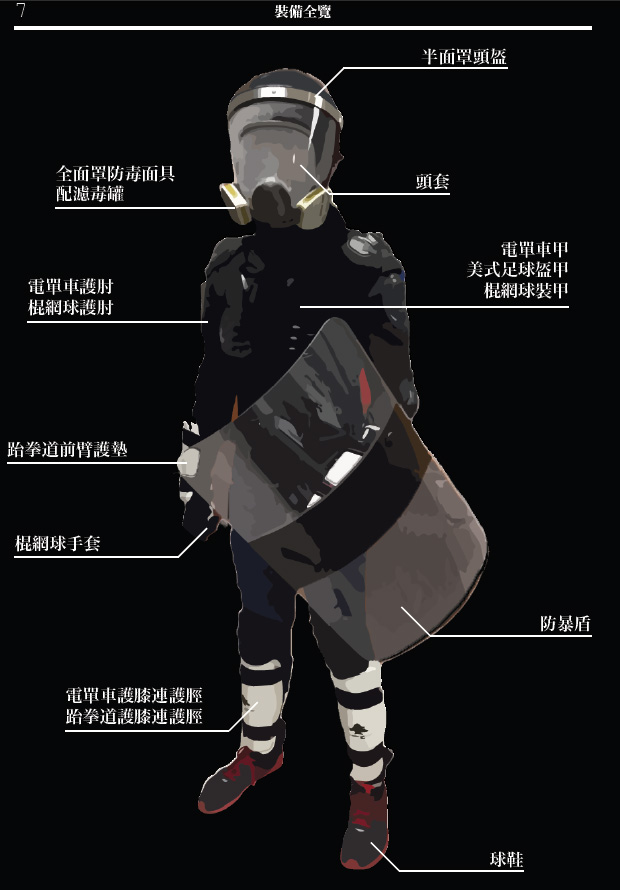
- Looks terribly hot when its 33 degrees outside. You will be dropping dead from
heat exhaustion within one hour.
- This was obviously written by a green novice who didn't even bother to read up
on
Protective Equipment in Gridiron Football. If he did, he would know that
the single most important piece of equipment is: the jockstrap (=athletic
supporter). Or maybe a woman wrote this handbook ...
- Oh, it isn't easy to be
"valiant." First, you need to be physically fit. Fortunately, just seven minutes
a day will make you fit to become a "valiant resister."
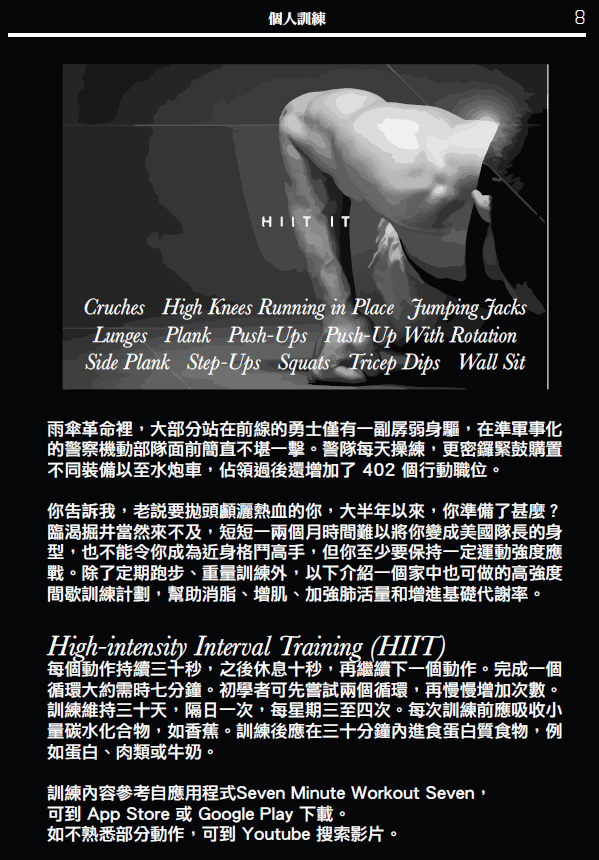
- I was wondering what they
propose to do if they escalate the violence and the police eventually used guns.
I had to laugh when I read the bottom line: "ALWAYS MAKE SURE THAT THERE ARE
OBSTACLES IN FRONT OF YOU, INCLUDING PEOPLE." You can't make that up.
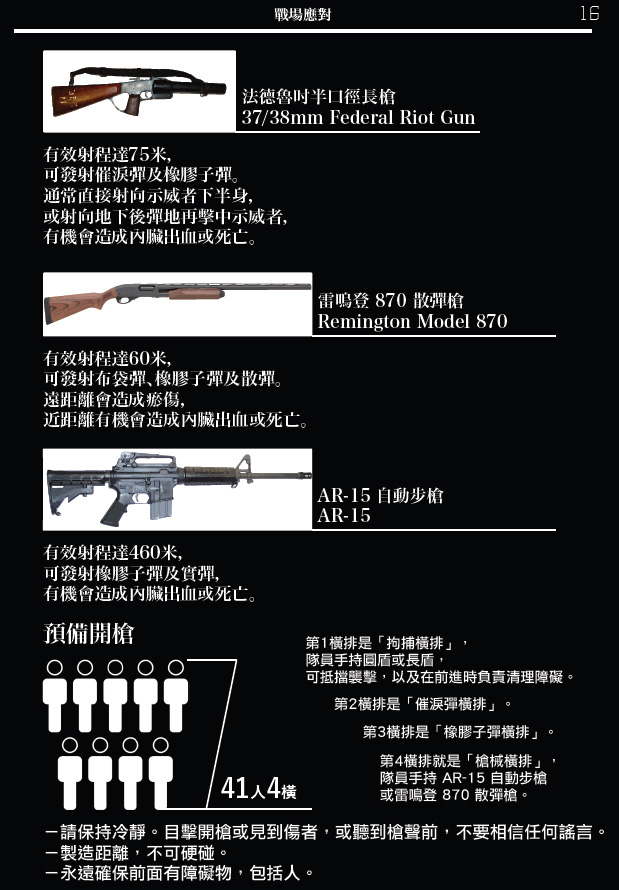
- (Associated
Press) What Dzhokhar Tsarnaev needed to learn to make explosives with a
pressure cooker was at his fingertips in jihadist files on the Internet,
according to a federal indictment accusing him of carrying out the bombings at
the Boston Marathon that killed three people and injured dozens more. Before the
attack, according to the indictment, he downloaded the summer 2010 issue of
Inspire, an online English-language magazine published by al-Qaida. The issue
detailed how to make bombs from pressure cookers, explosive powder extracted
from fireworks, and lethal shrapnel.
- I was disappointed. I was expecting a bomb-making manual but this is nothing
of the sort. Instead, they were teaching you what to do when the policeman in
front of you is swinging a baton at you.
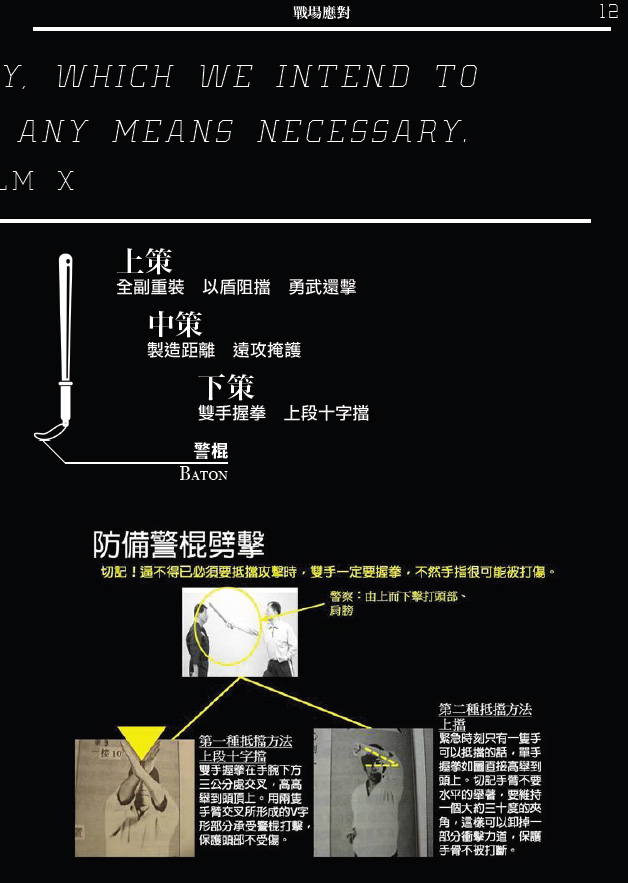
- The
salt works scene from the movie <Gandhi>?
- I do my seven minutes workout every day in order to prepare myself to be
clubbed in the head by the police? What's in it for me except for my
subjective sense of moral superiority?
- There is even a
YouTube
propaganda video with ominous music: The people of Hong Kong, you have endured
enough. To defend your own, you must resist valiantly. We fight to our death for
our freedom. We will not be sandbags anymore. We will counter-attack. One man's
efforts are tiny, but the efforts of a group of people will be enough to resist
the authorities. Do not let our young generation fight alone.
- The resistance leaders are
looking for more fools willing to go out and get clubbed in the head by the
police. This makes for good movies that will raise more money for the resistance
leaders to look for even more fools willing to go out and get clubbed in the
head by the police. The supply is inexhaustible "because they can't kill us
all."
Q1. Do you think the Legislative
Council should pass the Chief Executive election proposal?
63.6%: Yes
29.6%: No
4.1%: Hard to say
2.7%: No opinion
Q2. How confident are you that the
Legislative Council will pass the proposal?
26.5%: Confident
50.5%: No confident
20.9%: Hard to say
2.2%: No opinion
Q3. Do you think that failure to
pass the proposal will have positive or negative consequences?
18.9%: Positive
51.6%: Negative
15.9%: No consequence
12.6%: Hard to say
1.0%: No opinion
Q4. If the Legislative Council
fails to pass the proposal, will you vote again for those Legislative Councilors
who voted NO this time?
23.5%: Yes
57.4%: No
13.1%: Undecided
6.0%: No opinion
Q5. Do you support the
opposition's violent tactics in harassing government officials reaching out to
local communities?
25.7%: Support
59.1%: Do not support
8.8%: Don't care
6.4%: No opinion.
(Wen
Wei Po) The New Territories Association of Societies interviewed 828
Hong Kong citizens on June 1-9.
Q1. Do you want to have
one-person-one-vote to elect the Chief Executive?
85.5%: Yes
3.6%: No
Q2. Do you think that the Chief
Executive election must be based upon the Basic Law?
71.9%: Yes
20.2%: No
Q3. Do you think that the Hong
Kong SAR government should make a proposal for Chief Executive election based
upon the August 31st framework set by the National People's Congress Standing
Committee?
63.0%: Yes
30.1%: No
Q4. Do you think that the
Legislative Council should pass the Chief Executive election proposal based upon
the August 31 resolution of the NPCSC?
62.2%: Yes
30.7%: No
7.1%: No opinion
Question: Do you think the
Legislative Council should pass the proposal for the 2017 Chief Executive
election method?
| Response |
May 12-16
2015 |
May 21-23
2015 |
May 28-30
2015 |
June 5-7 2015 |
| Yes |
51.3% |
49.3% |
47.5% |
49.4% |
| No |
40.1% |
39.4% |
38.2% |
39.5% |
| Unaware of the proposal |
3.1% |
4.2% |
4.7% |
4.0% |
| No opinion/Hard to
say/Refused to answer |
5.6% |
7.2% |
9.8% |
7.2% |
Internet comments:
- Inevitably this poll will be
compared to the Hong Kong University/Chinese
University of Hong Kong/Polytechnic University rolling poll. Before you
waste any more time, I will just tell you that the questions are different:
HKU/CUHK/PU asked: Do you support
or oppose the government’s proposal on Chief Executive election of 2017?
CUHK-IAPS asked: Do you think the
Legislative Council should pass the proposal for the 2017 Chief Executive
election method?
Some people don't like the
government's proposal on Chief Executive election, but nevertheless think the
Legislative Council should pass that proposal, because not passing it means
continuing with the 1,200-person small-circle election committee in 2017 as well
as no full universal suffrage for the Legislative Council in 2020.
- (Speakout
HK)
For the first time, the support
and oppose rates were equal in the three-university rolling polls yesterday.
Labour Party chairman Lee Cheuk-yan cheered when he heard about it. He said that
that the two numbers are in "golden convergence" and he is looking forward to
the "golden crossover." Today's numbers indeed showed that oppose has passed
support. But what is Lee Cheuk-yan so joyful about?
First, we should point out that
the three-university rolling polls are asking: "Do you support or oppose the
2017 Chief Execution election proposal from the government?" Those who oppose
the proposal may nevertheless want the Legislative Council to pass the proposal.
Therefore, the numbers in the poll should not be interpreted as "oppose the
passage of the bill." Today, Polytechnic University Centre for Social Policy
Studies director Chung Kam-wah who is part of the three-university team said on
radio that the poll results do not reflect whether the interviewees want to
"pocket it first" or not.
But no matter whether more or
fewer people support than oppose, everybody will be a loser if the bill fills to
pass. There are no winners. So where does Lee Cheuk-yan's 'joy' come from? Chung
Kan-wah said on radio today: "What joy can there be?"
Will Hong Kong get out of the
doldrums after the constitutional reform is vetoed? Will the heated debates
stop? Chief Executive CY Leung said that he will turn towards livelihood issues
after the constitutional reform proposal is voted upon, but will the radicals
stop? If the answer is no, then what is Lee Cheuk-yan cheering about?
Indeed, even if the constitutional
reform proposal is vetoed, the sky won't fall down. But the prospect of
continual political wrangling with no prospect for short-term or mid-term
resolution should sadden every Hongkonger, not making them cheer. Of course, the
exceptions are the politicians with ulterior motives.
(EJinsight)
Police has worst public image among HK disciplinary forces: poll. June 11, 2015.
The police has the worst public image among
all the city’s disciplinary forces, according to a survey by the Public
Opinion Program of the University of Hong Kong. The satisfaction rate of
Hongkongers towards the police stood at 50 percent, marking a decline of 6
percentage points from a previous survey six months ago. Meanwhile, the
dissatisfaction rate of locals towards the police was up 2 percentage points
to 29 percent, in the survey which was conducted between May 29 and June 2.
The net satisfaction rate — the difference between the satisfaction rate and
dissatisfaction rate —towards the police force fell from 29 percent to 21
percent, which is the lowest figure since 1997. The figure decreased from 51
percent in late 2013 to 36 percent in mid-2014 and further dropped to 29
percent in late last year after the Occupy movement.
The latest survey results were based on
responses from 1,038 people.
In terms of net satisfaction, the Fire
Services Department recorded 92 percent, and is definitely the most popular
disciplinary force in Hong Kong. Meanwhile, net satisfaction rate of the PLA
Hong Kong Garrison was at 34 percent, compared with 35 percent six months
ago.
This is the first ever full-coverage
survey, which shows that the recognition rates of Hong Kong’s disciplinary
forces are all above 75 percent, said Robert Ting-Yiu Chung, director of
HKU’s Public Opinion Programme.
In terms of net satisfaction rate, the
Auxiliary Medical Service took the second rank after the Fire Services
Department, with a figure of 81 percent. It was followed by the Government
Flying Service (77 percent), the Immigration Department (73 percent), the
Customs and Excise Department (64 percent), the Civil Aid Service (60
percent), the Correctional Services Department (57 percent) and the
Independent Commission Against Corruption (49 percent).
Comments:
You get the impression that the Hong Kong
Police is the worst among the Hong Kong disciplinary forces. Furthermore
they have gotten worse over time.
Let's look at some more data from the same
Hong Kong University Public Opinion Programme.
(HKU
POP)
Please rate on a scale of 0-100 your satisfaction with the Hong Kong Police
Force as a disciplinary force. 0 stands for very dissatisfied, 100 stands
for very satisfied, 50 stands for half-half. How would you rate it?
|
Date of survey |
Total Sample |
Satisfaction Rating |
Standard Error |
|
29/5-2/6/2015 |
1,038 |
61.0 |
1.1 |
|
25-28/11/2014 |
1,012 |
61.0 |
1.2 |
|
25-30/6/2014 |
1,009 |
62.3 |
0.9 |
|
29/11-3/12/2013 |
1,022 |
63.7 |
0.8 |
|
26/6-2/7/2013 |
1,008 |
66.4 |
0.8 |
|
4-12/12/2012 |
1,010 |
67.0 |
0.8 |
|
13-20/6/2012 |
1,001 |
63.0 |
0.9 |
The latest satisfaction rating is 61.0 with
a standard error of 1.1. The oldest satisfaction rating is 63.0 with a
standard error of 0.9. The difference (63.0 - 61.0) = 2.0 has a standard
error of SQRT (1.1*1.1 + 0.9*0.9) = 1.42. According to the
Student's t-test, the difference is not statistically different. In
other words, the Hong Kong Police is not rated any differently in 2015 from
3 years ago.
Now for a different question from the same
HKU-POP.
(HKU
POP) Are you satisfied with the performance of the Hong Kong Police
Force? (Very positive/positive/half-half/negative/very negative/don't
know/hard to say)
|
Date of survey |
Positive |
Half-half |
Negative |
Don't know/
Hard to say |
|
29/5-2/6/2015 |
50.4% |
19.2% |
29.5% |
1.0% |
|
25-28/11/2014 |
56.1% |
15.2% |
27.0% |
1.6% |
|
25-30/6/2014 |
55.6% |
23.8% |
19.4% |
1.2% |
|
29/11-3/12/2013 |
64.3% |
21.9% |
13.2% |
0.6% |
|
26/6-2/7/2013 |
59.4% |
24.8% |
13.1% |
2.8% |
|
4-12/12/2012 |
66.0% |
22.8% |
9.0% |
2.2% |
|
13-20/6/2012 |
54.6% |
29.0% |
13.8% |
2.6% |
For the same period as above, the
difference (54.6 - 50.4) = 4.2% has a standard error of SQRT[(50.4*49.6/639
+ 54.6*45.4/540) = 2.9. According to the Student's t-test, the difference is
not statistically different. In other words, the positive rate towards the
Hong Kong Police is not different in 2015 from 3 years ago.
Next, do you know the reason why the net
satisfaction rate for the Hong Kong Police is dropping? The drop is due
largely to the increase in negative satisfaction. I leave you with two
propositions:
(1) People are dissatisfied with police brutality against pro-democracy
demonstrators during the Occupy period.
(2) People are dissatisfied with police inaction to clear the Occupy sites
and give the streets back to the citizens.
This poll yields zero information for you to choose between the two.
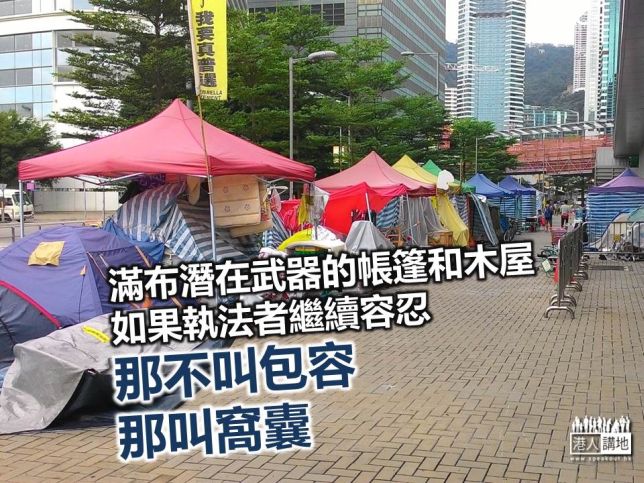
Speakout HK:
Filled with tents and sheds laden with hidden weapons
If the law enforcers continue to tolerate this
This is not called tolerance
This is called being useless
The most important rule in
cross-examination of witnesses in court is: Never ask a question when you
don't know the answer. In like manner, some polling organizations will never
ask a question whose answer they may not like.
Apart from the
disciplinary services, who else can you compare the Hong Kong Police with?
(HKU
POP) Are you satisfied with the overall performance of the members
of HKSAR Legislative Council?
|
Date of survey |
Positive |
Half-half |
Negative |
Don't know/
Hard to say |
|
14-28/12/2011 |
16.9% |
28.0% |
48.7% |
6.4% |
|
13-20/9/2011 |
12.5% |
27.5% |
54.1% |
5.9% |
|
23-29/6/2011 |
10.5% |
32.6% |
50.7% |
6.2% |
|
21-30/3/2011 |
13.2% |
32.9% |
50.9% |
3.0% |
|
17-22/12/2010 |
19.2% |
31.8% |
41.1% |
7.8% |
|
18-24/9/2010 |
20.8% |
35.9% |
37.2% |
6.0% |
|
18-22/6/2010 |
18.9% |
23.4% |
51.3% |
6.4% |
|
23-25/3/2010 |
18.3% |
26.8% |
49.4% |
5.5% |
|
14-17/12/2009 |
17.7% |
30.4% |
46.5% |
5.5% |
|
14-17/9/2009 |
21.0% |
39.1% |
34.4% |
5.5% |
|
16-21/6/2009 |
20.8% |
37.5% |
35.4% |
6.2% |
|
9-11/3/2009 |
20.9% |
33.1% |
39.9% |
6.1% |
|
16-18/12/2008 |
26.0% |
31.7% |
29.3% |
13.1% |
Alas, HKU-POP no
longer asks this question, because it really really really makes the
Legislative Council look bad. Compared to those clowns, the Hong Kong Police
are absolute angels. The media says that the Police with a +29% net
satisfaction rate is in the pit, but the Legislative Council has a -31% net
satisfaction rate.
But you should not be
too harsh on the Legislative Council, because what is happening here is a
design feature. Hong Kong is a polarized society and the Legislative Council
is nominally democratic. Therefore, the Legislative Council is necessarily
polarized as well. When the vote goes one way, the other side throws a
tantrum (=banana) for the evening television news. When the vote goes the
other way, this side does the same and says that this is the darkest day in
Hong Kong history (or something). If a compromise is reached, neither side
will be happy as they all cry "Betrayal!" The people observe these actions
and form their opinions. That's all.
What do people think
about the media reporting on things like the public image of the Hong Kong
Police?
(HKU
POP) Do you think the news media in Hong Kong are responsible in
their reporting?
13-16/4/2015
26.3%: Responsible
35.7%: Half-half
31.9%: Irresponsible
More importantly,
what do people think about the university public opinion polling
organizations? Alas, this question is never asked. So we can only
speculate about what the 70%+ who refused to participate are thinking.
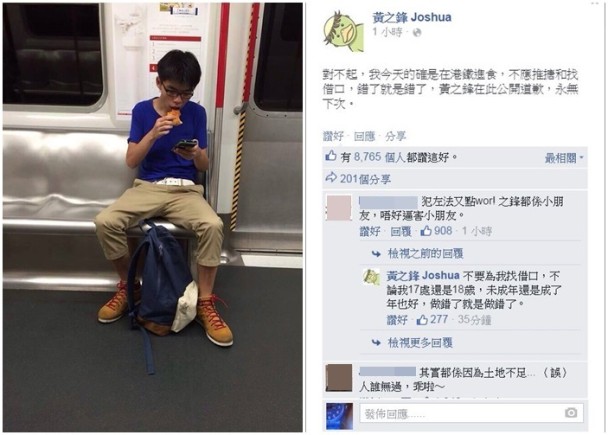
This morning, an Internet media
Facebook page posted a photo of Joshua Wong eating a bun in an MTR car. The
subtitle was "Big expert liar Joshua Wong says one thing but does the opposite;
he knowingly broke the law by eating in the MTR subway."
Later Joshua Wong wrote his own
Facebook: "Sorry. I did eat in the MTR today. I have no evasions or excuses.
When I am wrong, I am wrong. Joshua Wong publicly apologizes here. There will
never be a next time."
Internet comments:
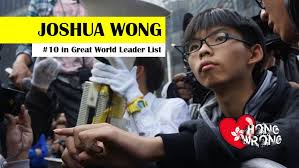
- Leadership qualities of Joshua Wong, #10 in
Great World Leader List of Fortune magazine
- Isn't he on an indefinite
glucose-enhanced hunger
strike? Now he is eating a bun? To recuperate?
- The original Facebook version
called Wong a "Big Expert Liar". How did he earn that reputation? He promised
that Scholarism would be disbanded after the National Education issue, but they
are still going around charging police lines and swindling donations. Also, he
falls down at every demonstration and screams "Police brutality!"
- Oh, the version that I saw had the subtitle: "Strong Nation Man from Ap Lei
Chau found eating food in MTR."
- Yes, the current Localist belief system contains the tenet: If you see someone
defecating/urinating/eating in the MTR, then that person must be an uncivilized
Strong Nation Locust.
- I am pretty sure that when this Strong Nation Man finishes eating and gets
off, he is going to defecate/urinate on the platform immediately.
- Remember the famous
Thick
Toast mainland woman? She was subjected to an Internet lynching.
- After Wong finished eating, he
apologized. According to Alex Chow, Wong has thus completed the rule-of-law
process. So what more do you want?
- The rule-of-law process is not
complete until Joshua Wong mails in his check for the $5,000 fine. (Wikipedia:
According to the Mass Transit Railway By-Law, eating or drinking, and smoking
are not allowed in the paid area of stations or in trains. Offenders will be
fined up to HK$5000.)
- Because he was photographed, he
had to apologize. If he hadn't been photographed, he would have just kept going
and never be bothered by any pangs of conscience. This is rule of law (that is,
when you break the law, you make sure that you are not seen).
- The photographer and his camera should be commended. If the photo was fuzzier,
Wong would have tried to deny it.
- When Joshua Wong breaks the law,
he gets away with an apology on Facebook. If the individual is a mainland boy,
what do you think Hong Kong Localism Power's Mr. Ho will have to say?
- Apologize? Isn't he supposed to
resign (from whatever positions he currently holds)? This is what he always
demand of government officials.
- It was very wrong for the
photographer to post it on Facebook. If there is a wrongful act, it should be
reported to the MTR authorities. Posting it on Facebook is a serious violation
of the right to privacy of Joshua Wong. He should be filing a complaint to the
United Nations Human Rights Commission.
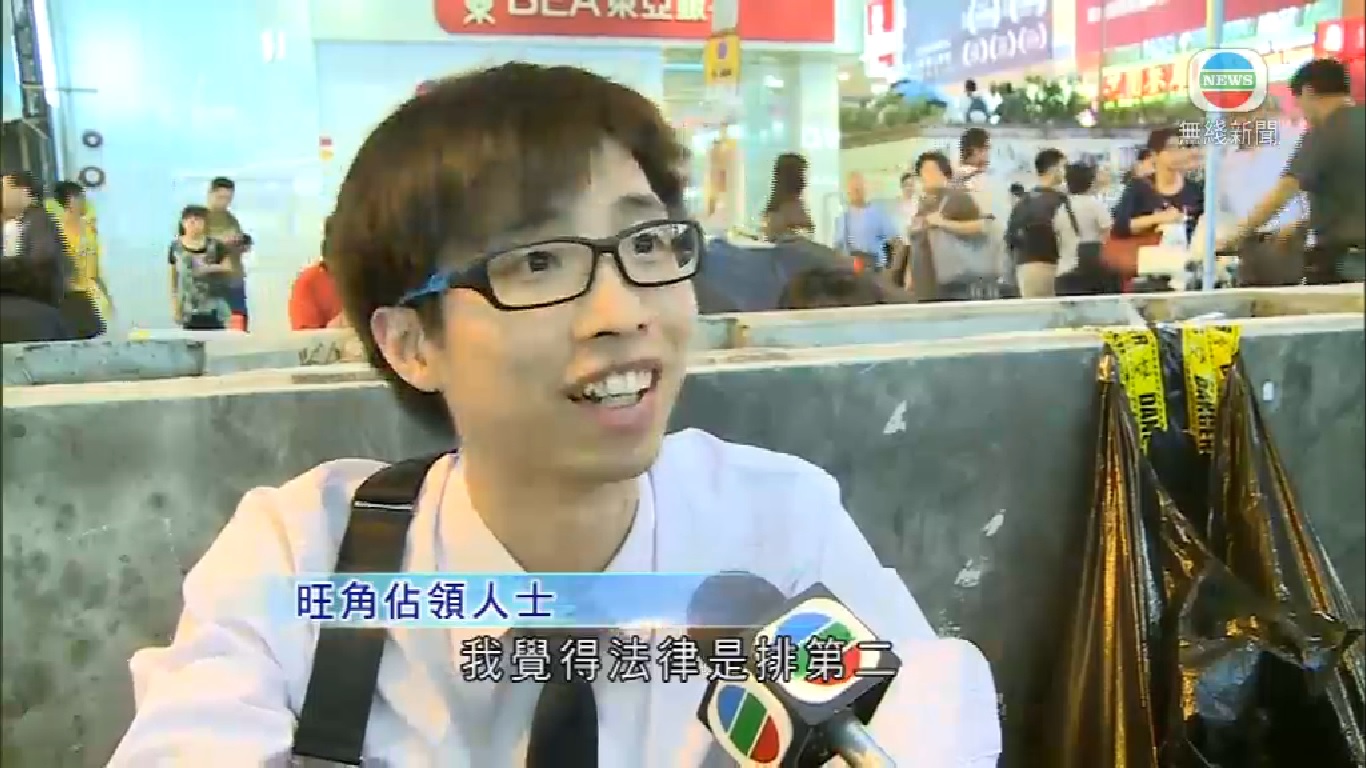
Here is a TVB screen capture of an Occupy Mong Kok demonstrator
announcing: "I feel that the law comes second." So what comes first?
According to Joshua Wong, it is eating food.
- Rule of man and not rule of law. Top frames: Mainlander mother
and son. Bottom frames: Joshua Wong.
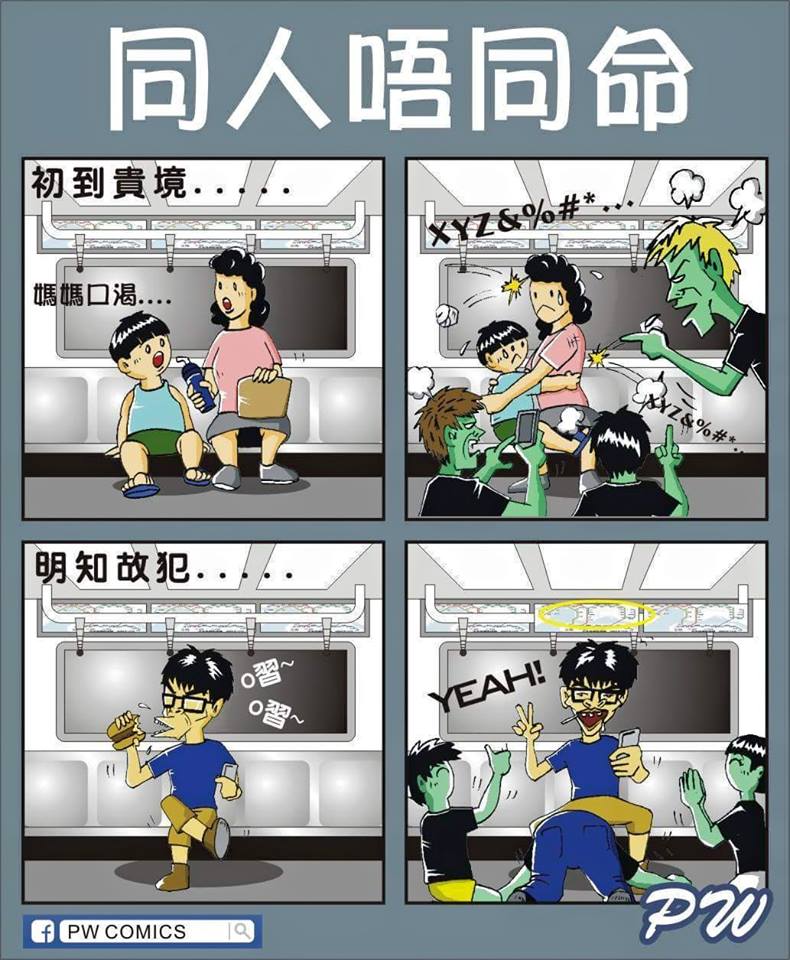
-
Civil
disobedience: the active, professed refusal to obey certain laws,
demands, or commands of a government, or of an occupying international power.
Civil disobedience is sometimes, though not always defined as being nonviolent
resistance.
Since the MTR By-law of forbidding food consumption is inhumane, cruel and
unhealthy, it can be and it should be disobeyed.
-
Famine Is A Crime: If widespread famine now only occurs after the
deliberate acts of leadership create the conditions for starvation, what should
be the international response? In a 2003 article in the American Journal of
International Law, lawyer David Marcus argued that famine could constitute a
crime against humanity. European Parliamentarians have set a precedent by
recognizing the Ukrainian famine of 1932 — in which Stalin’s government forced
grain removals and forbade movement in a way that guaranteed widespread
starvation — as such. And most famines of the more recent past fit that
description very well. That suggests it should become standard practice for the
ICC to issue warrants for the arrest of leaders of regions or countries where
mass starvation occurs.
Therefore the ICC should issue an arrest warrant for CY Leung for causing mass
famine within the MTR.
-
[260]
Hong Kong By The Numbers (2015/06/07) (Lingnan
University Public Governance Programme) 1,051 adult Hong Kong residents
were interviewed May 31 to June 5 by telephone. Telephone numbers were randomly
drawn from the telephone directory and the last two numbers were randomized.
After contact was made, an eligible person was randomly selected within the
household. The response rate was 36.6%. The study was commissioned by the
Concern Group for Public Opinion on Constitutional Development.
Q1. Some people think that the
proposed Chief Executive election method imposes many restrictions, so that they
want the Legislative Council not to pass the proposal. Other people think that
even with these restrictions, they want the Legislative Council to pass the
proposal so that we can have one-person-one-vote to elect a Chief Executive.
Where do you stand?
42.2%: Don't pass the legislation
49.4%: Pass the legislation
4.2%: Neither
4.2%: Don't know/no opinion.
Q4.1. If the National People's
Congress Standing Committee promises to make changes to the Chief Executive
election method after 2017, then what?
26.2%: Don't pass the legislation
62.0%: Pass the legislation
4.2%%: Neither
7.2%: Don't know/no opinion
Q4.2. If the group and corporate
votes are replaced by individuals on the election committee, then what?
22.0%: Don't pass the legislation
66.2%: Pass the legislation
4.2%: Neither
7.0%: Don't know/no opinion
0.6%: Refused to answer
Q4.3. If more than half of the
voters cast blank votes, then the Chief Executive election is null and void.
Then what?
21.5%: Don't pass the legislation
67.1%: Pass the legislation
4.2%: Neither
7.0%: Don't know/no opinion
0.3%: Refused to answer
Q5. Some people think that if the
government's proposal is not passed, then 2017 will use the existing Chief
Executive method without universal suffrage. Other people think that if the
proposal is not passed, then the political reform process will be re-started for
a more democratic Chief Executive election method. What do you think?
43.7%: Use same old method
41.4%: Re-start political reform process
7.6%: Neither
6.8%: Don't know/no opinion
0.4%: Refused to answer
Q6. Some people think that if the
government's proposal is not passed, then the 2020 Legislative Council election
will not be changed. Other people think that if the proposal is not passed, then
the political reform process will be re-started for a more democratic
Legislative Council election method. What do you think?
39.7%: Use same old method
40.2%: Re-start political reform process
11.2%: Neither
8.5%: Don't know/no opinion
0.4%: Refused to answer
Q7. What will become of the
relationship between Beijing and Hong Kong if the government's proposal is
passed by the Legislative Council?
52.6%: Become better
36.4%: Stay the same
15.6%: Become worse
5.0%: Don't know/no opinion
0.4%: Refused to answer
Q8. What will become of the
relationship between Beijing and Hong Kong if the government's proposal is not
passed by the Legislative Council?
3.8%: Become better
37.5%: Stay the same
52.4%: Become worse
5.9%: Don't know/no opinion
0.4%: Refused to answer
Q9. Some people think that even if
persons with certain political views are excluded, it is meaningful enough to
have one-person-one-vote to elect the Chief Executive. Other people think that
if these people are excluded, the Chief Executive election is meaningless even
with one-person-one-vote. What do you think?
44.7%: Meaningful
43.3%: Meaninfless
6.3%: Neither
4.7%: Don't know/no opinion
1.0%: Refused to answer
Q10. What do you think is the
likelihood of the Legislative Council passing the 2017 Chief Executive election
proposal?
11.5%: Very likely
44.7%: Very unlikely
40.6%: Half-half
2.7%: Don't know/hard to say
0.5%: Refused to answer
Q11. Some people think that if
universal suffrage is not realized for the 2017 Chief Executive election, Hong
Kong will suffer huge losses politically, economically and socially. Other
people say that business will as usual without serious consequences. What do you
think?
27.9%: Suffer huge losses
62.9%: No serious consequences
5.0%: Neither
4.0%: Don't know/no opinion
0.3%: Refused to answer
Q14. In the Legislative Council,
how important is the position of the candidate on political reform?
31.3%: Very important
37.4%: Important
17.8%: Half-half
6.9%: Unimportant
2.1%: Very unimportant
1.8%: Not applicable (e.g. not a registered voter; no intent to vote)
2.7%: Don't know/no opinion
0.1%: Refused to answer
Q15. If you voted for a certain
legislator but his position on political reform is the opposite of yours. Will
you not vote for him/her the next time?
64.1%: Definitely not vote for him
27.5%: May or may not vote for him
2.5%: Not applicable (e.g. not a registered voter; no intent to vote)
5.2%: Don't know/no opinion
0.6%: Refused to answer
Comments:
(SCMP)
Meanwhile, the Concern Group for
Public Opinion on Constitutional Development found in its poll, held from May
31 to June 5, that 49.4 per cent of 1,051 people hoped lawmakers would pass
the reform plan despite its shortcomings. The figure was down 1.4 percentage
points from last month. Some 42.2 per cent opposed the plan.
(EJinsight)
A poll conducted by Lingnan
University on behalf of the Concern Group for Public Opinion on Constitutional
Development also found that the gap between the levels of support and
opposition to the electoral package has shrunk, Apple Daily reported. The poll
showed that 49.4 percent of people now expect lawmakers to pass the reform
plan despite its shortcomings. The figure marks a decline of 1.4 percentage
points compared to those who expressed a similar opinion in a previous survey
undertaken between April 27 and May 2. Meanwhile, 42.2 percent of the
respondents opposed the plan, up 0.5 percentage point from the previous
survey, according to the report. The latest poll was conducted from May 31 to
June 5, taking in the responses of more than 1,000 people.
The margin of error (=standard
error) of the difference between the two independent survey estimates (each
based upon about 1,000 sample size and each being around 50%) is SQRT[(50x50/1000)
+ (50x50/1000)] = 2.2%. Therefore, the observed 1.4% drop is not statistically
significant.
There is no point in wasting
your time on interpreting the trending.
Definitions:
One NON (單非):
a baby born in Hong Kong to a parent who is a Hong Kong permanent resident
Two NONs (雙非):
a baby born in Hong Kong to parents who are both not Hong Kong permanent
residents
Three NONs (三非):
a baby born outside of Hong Kong to parents who are both not Hong Kong permanent
residents
According to the Court of Final
Appeal, anyone who is "One NON" or "Two NONs" has right of abode in Hong Kong,
and is therefore entitled to be educated in Hong Kong. If their parents choose
to reside outside Hong Kong while the children commute to school, the children
become cross-border pupils. Not every cross-border pupil is a "Two NONs" because
there are plenty of Hongkonger parents working and residing in Shenzhen.
(Oriental
Daily) June 6, 2015.
On this day, the central
allocation results of the
Primary One Admission (POA) are released. At the
Heung Hoi Ching Kok Lin
Association's Buddhist Wisdom Primary School in Sheung Shui, a dozen or
so Localists demonstrated. They set up a large banner saying "I am not Chinese"
and they used a megaphone to urge "Two NONs" students to go study in mainland
China and hence release their spaces so that students with one or more parents
being Hong Kong permanent residents do not have to commute further away.
Hong Kong Localism Power
spokesperson Ho Chi-kwong said that the demonstration today was directed neither
at the Buddhist Wisdom School nor the "One NONs." Instead the targets are mainly the
"Two NONs" children. He accused the parents of those children of coming to Hong
Kong as tourists, had their babies delivered in Hong Kong hospitals to obtain
right of abode and then to use up the school spaces so that local students have
to commute to schools outside their local communities. Ho also said that it was
inhumane for these children to commute several hours a day across the border. Ho
also expressed concern that as these children grow old, they will continue to
take up space in secondary schools and universities, and eventually jobs away
from Hongkongers. Worst yet, when these children grow up, they will even apply
for their parents to come to Hong Kong for the purpose of family reunification.
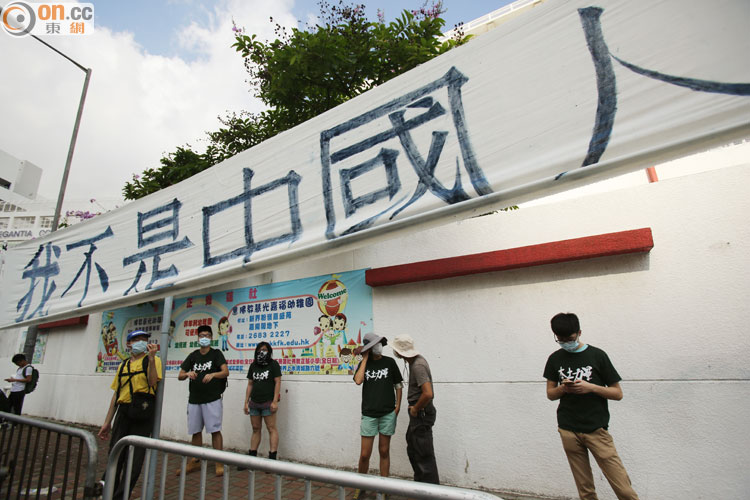
Banner: "I am not Chinese"
Meanwhile a man passed by, saw the
demonstrators and started cursing them for "causing trouble in a Chinese place."
He accused the demonstrators of "looking for exposure." The two sides cursed
each other out for several minutes. The police came and separated the sides.
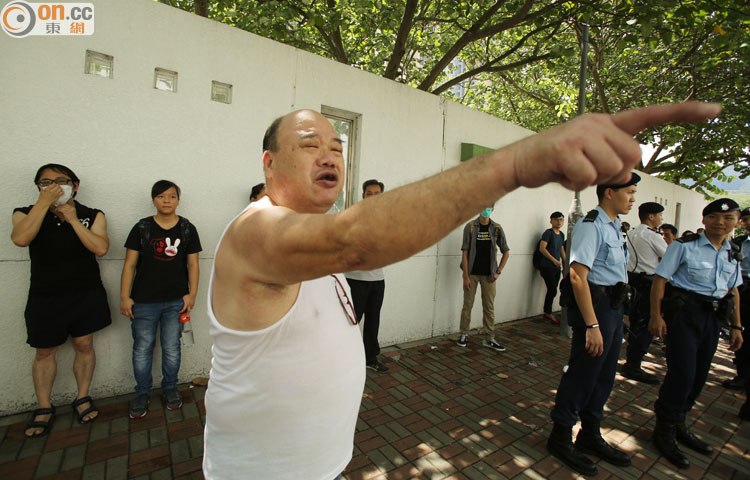
(Oriental
Daily) June 6, 2015.
About the Localists calling her
"Two NONs" daughter a "locust", Mrs. Zhang said: "What can I say? If we didn't
come to study, who is going to that school? We are benefiting. You keep saying
that we are stealing from you. Some day, our children will be paying taxes too."
According to North District
Primary School Principals Association chairman Chan Shiu-hung, there will be
about 2,600 cross-border pupils this year. The average school will be receiving
300 applicants, and some of the pupils will be allocated to places like Tin Shui
Wai, Tsing Yee and Ma On Shan. Chan said that not everyone will be happy with
the allocations, and that some people will hold demonstrators. Chan hoped that
the demonstrators will act with restraint and not harass the parents and pupils.
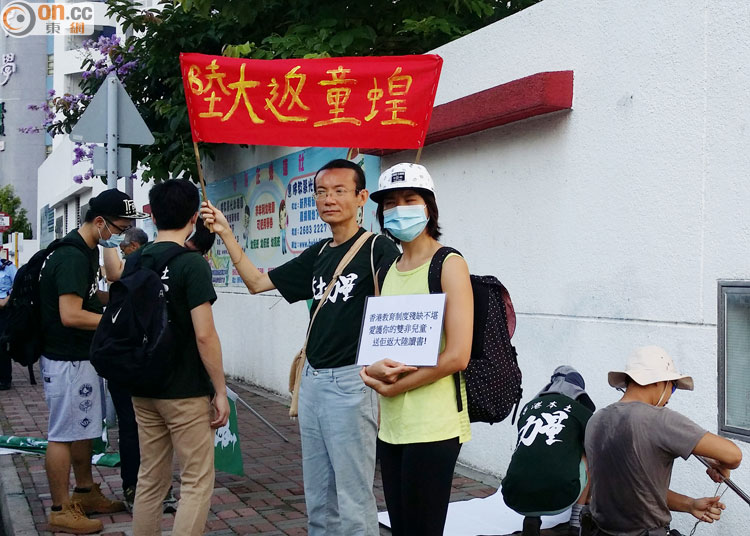
Banner: "Locust children, go back to mainland China."
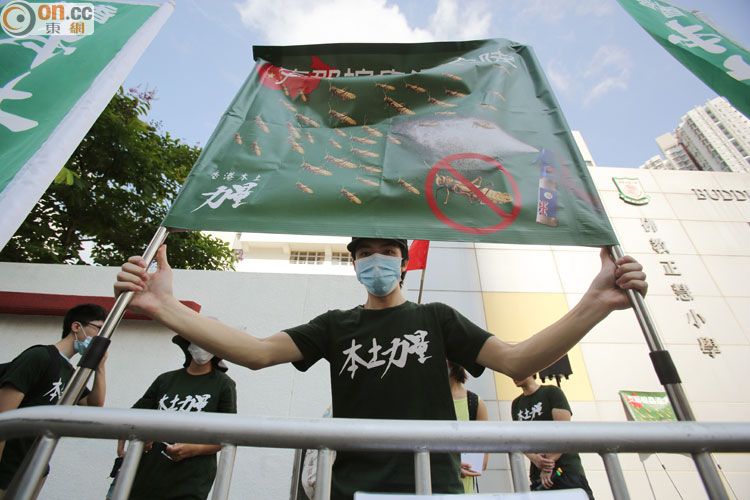
Banner: "Locust Chinks go back to mainland China"
Internet comments:
- Everything dates back to the
case of
Director of Immigration v Chong Fung Yuen. By the ruling in that case,
these Hong Kong-born children have right to education. So what are we arguing
about now? If you don't like the law, change it. If you can't change it, you can
overthrow the system with a revolution. But you will need more than a
dozen people to carry out your revolution.
-
Hong Kong Basic Law Article 24: The permanent residents of the Hong
Kong Special Administrative Region shall be: (1) Chinese citizens born in Hong
Kong before or after the establishment of the Hong Kong Special Administrative
Region; ...
- "I am not Chinese"? Well,
according to
Basic Law Article 1: The Hong Kong Special Administrative Region is
an inalienable part of the People's Republic of China. If you are not
Chinese, then what happens in Hong Kong (China) is none of your fucking
business.
- Why do they have to wear
surgical masks? Fear of
MERS?
Standing police arrest warrants?
- Even the Baby Kingdom moms
want these Localists to fuck off!
- (Apple
Daily, May 1 2011) According to Hong Kong Internet users, 14-year-old
Chong Fung-yuen is the founder of the dynasty of locusts who have wrought havoc
in Hong Kong. Chong said: "Every time that people talk about such things, they say
that I was the original sinner." "When I was in primary school, all the fellow
students knew about my background. By the time I reached secondary school,
almost nobody knew." Was he worried about people talking about him behind his
back? "No, I get along with them."
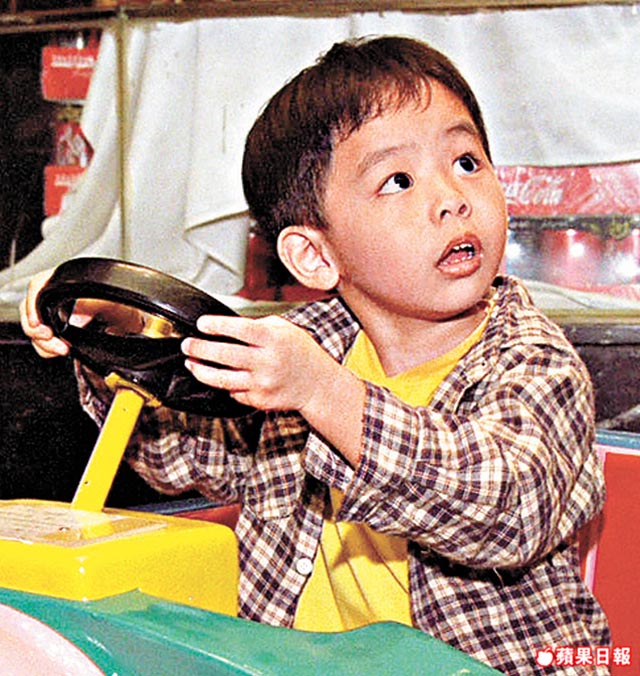
4-year-old Chong Fung-yuen in 2001
- Let us be clear about the
definitions of "Two NONs" and "Three NONs". They include all those whose parents
are not Hong Kong permanent residents, which includes mainlanders as well as
other nationals. So a child born to American parents is not entitled to
education in Hong Kong, according to Hong Kong Localism Power.
- (Apple
Daily) The Hong Kong Institute of Education interviewed more than 1,000
new immigrants from mainland who have moved to Hong Kong for about four years or
so. Only 12% said that they regarded themselves as Hongkongers. 55% said that
they suffered discrimination in Hong Kong. 60% said that Hongkongers do not
accept new immigrants. 66% said that Hongkongers are prejudiced against new
immigrants. 76% of the respondents that they can speak 76% fluent Cantonese, but
26% still use hometown dialects to communicate with friends and families. 40%
said that they never discuss local politics or public affairs with others.
- (Wen
Wei Po) Hong Kong Federation of Education Workers vice-chairman Wong
Wai-shing said that the Localists have the wrong target. "The government set up
the website to facilitate school allocation so as to solve the problems created
by the Civic Party's Director of Immigration vs. Chong Fung-yuan case. If the
localists are dissatisfied, they should express their views with the relevant
parties. Right now they are targeting the Two NONs pupils, using descriptive
terms such as 'locust kids'. This is verbal violence which conveys insult and
prejudice against those children. The result will be an increase in conflicts
between Hong Kong and the mainland without solving any problems. The local
residents will be annoyed, while mainlanders will find Hongkongers
incomprehensible."
- A Helena Wong parody:
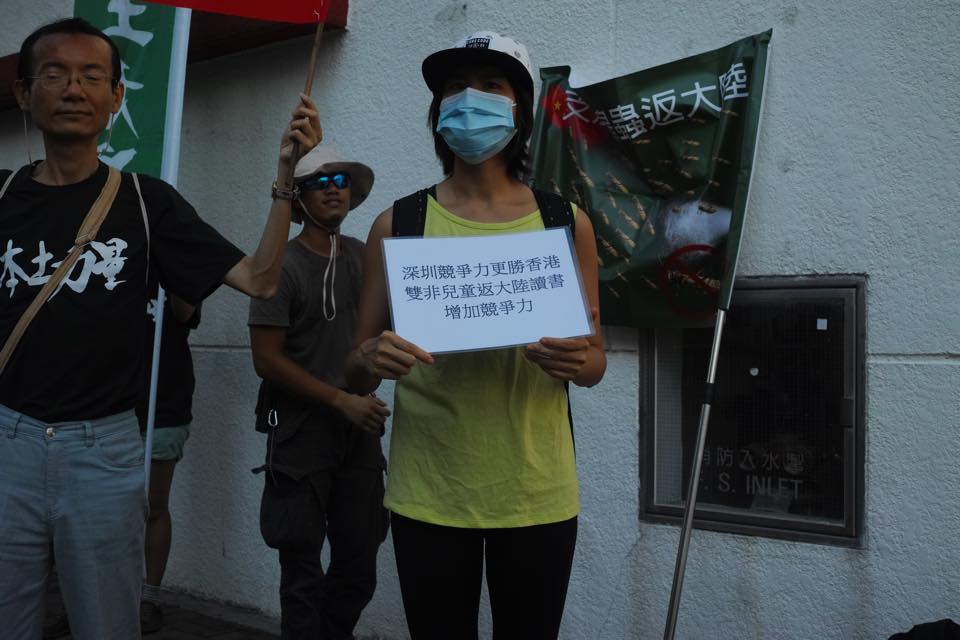
Spoofed placard: "Shenzhen is more competitive than Hong Kong because the Two NONs
children are returning to mainland to study in order to improve their
competitiveness"
- Shenzhen is now bigger than Hong Kong in (1) stock market trading volume; (2)
port container volume; (3) high technology companies (Tencent, QQ, Weibo, etc);
(4) real estate (Wanke); (5) automobiles (BYD); (6) diversity (Huawei, DJI,
etc).
(Oriental
Daily) June 5, 2015.
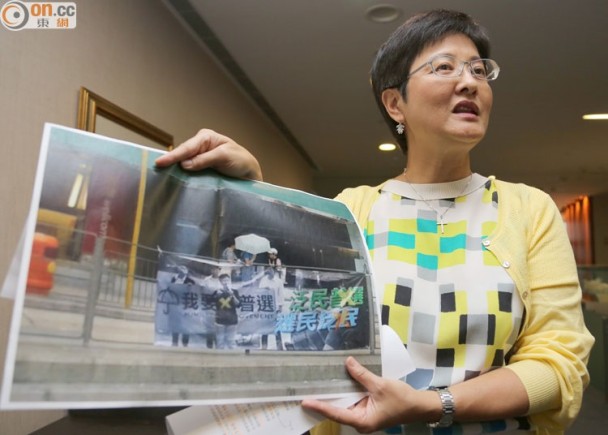
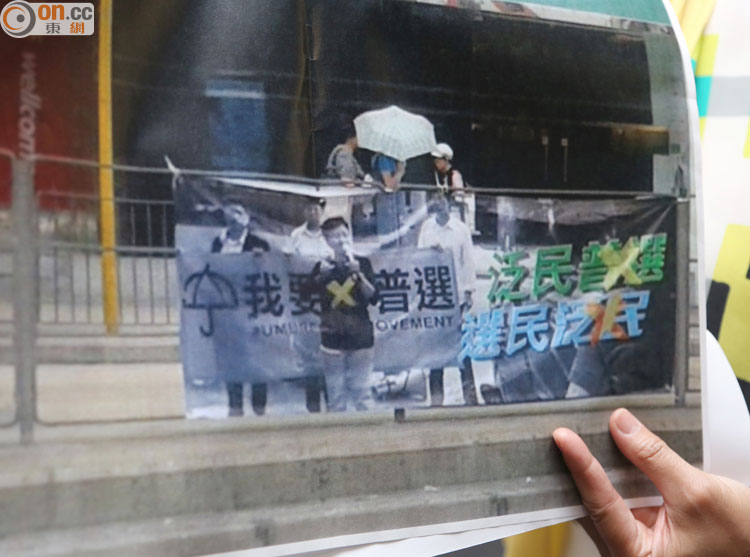
Democratic Party legislator Helena
Wong Pik-wan said that someone used her photo without permission to manufacture
a number of banners. These banners have been posted at the Kwun Tong MTR
station, Pioneer Centre (Prince Edward), Argyle Street (Mong Kok), Ta Kok Tsui,
etc. In these banners, Wong wears a t-shirt with a yellow cross in front. She is
standing before an Umbrella Movement banner with the words "I want genuine
universal suffrage." By standing in front, Wong blocked the word "genuine" with
an "X". The banner contains the sentences "pan-democrats universal suffrage" and
"voters pan-democrats." But crosses are used to create "pan-democrats
universal suffrage" and "voters pan-democrats"
instead. Wong believes that these posters are aimed at the pan-democrats over
the constitutional reform proposal, with the hint that voters should pay back at
the voting booths.
Wong thinks that the posters were
the work of West Kowloon pro-establishment camp. Wong has lodged
a complaint at the Mong Kok police station. Two weeks ago, Wong lodged a
complaint at the Yau Ma Ti police station about her banner being slashed
and defaced by unknown persons. She asked citizens to denounce these
perpetrators.
Internet comments:
- There are lots of other posters
that people should be complaining about as well. None of them have filed police
reports (yet).
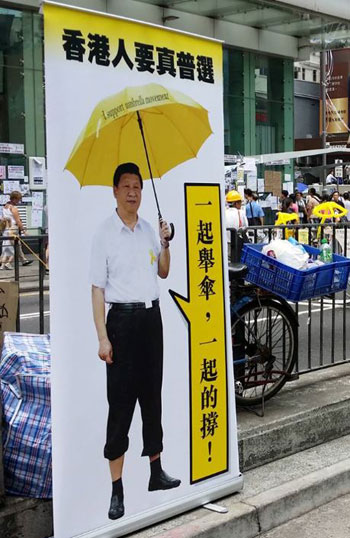
Chinese president Xi Jinping: "Hongkongers want genuine universal suffrage:
Let's raise umbrellas together, let's support it together!"
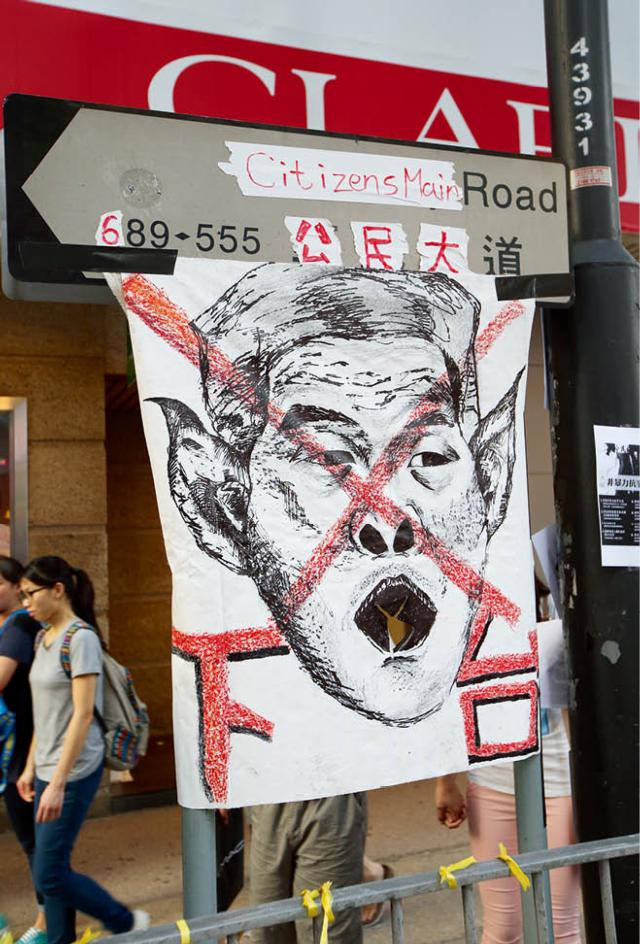
Chief Executive CY Leung: "Citizens Main Road:
'689' must resign"
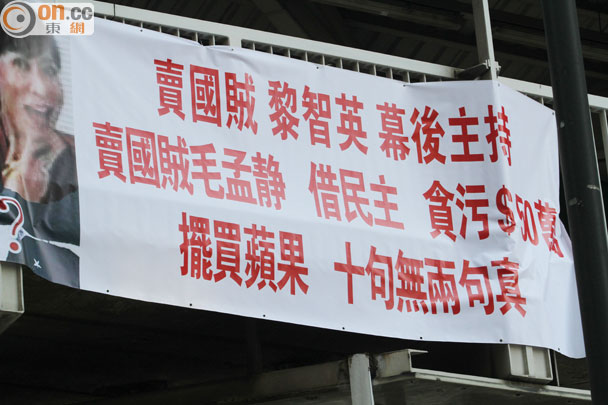
"Traitor Jimmy Lai behind the scenes
Traitor Claudia Mo Man-ching took $500,000 bribe in the name of democracy
Selling Apple, fewer than 2 sentences out of 10 sentences are truthful"
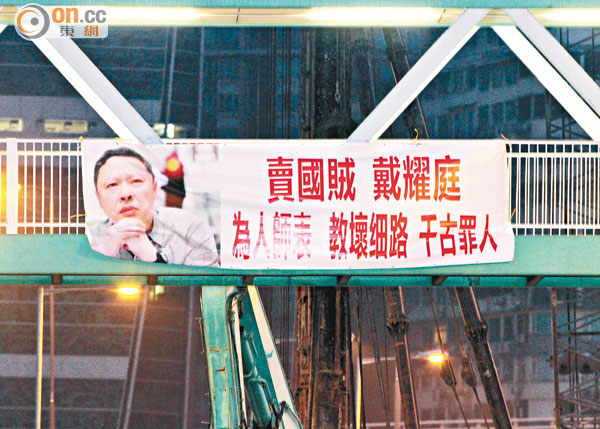
"Traitor Benny Tai
Teacher who mistaught the children. Millennium-long sinner"
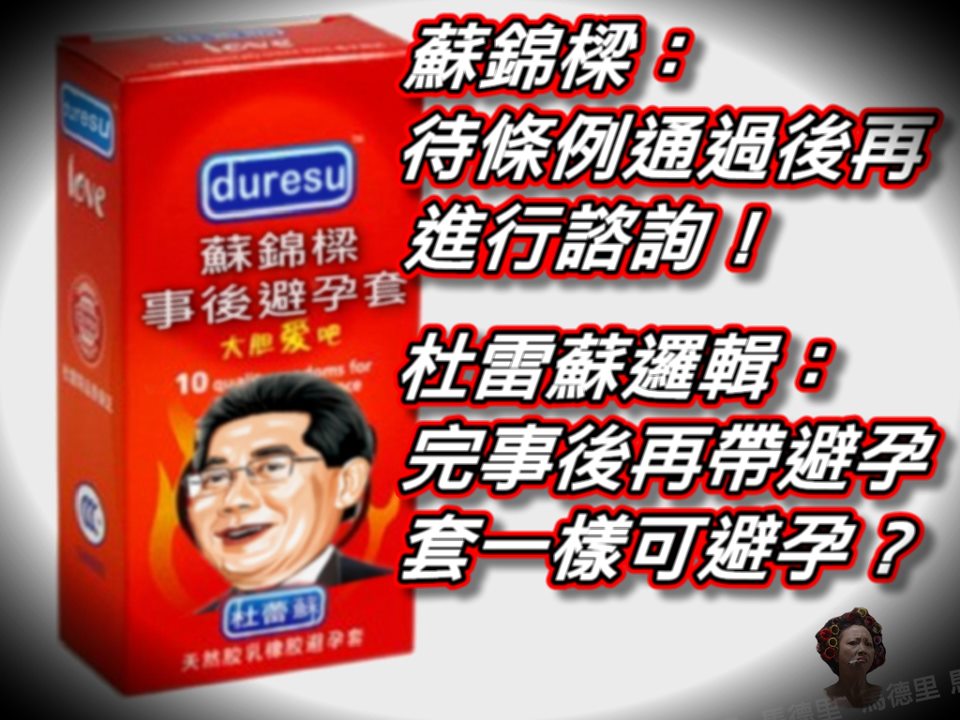
Secretary of Commerce and Economic Development
Gregory So Kam-leung: "Consultation can take place after the legislation is
passed."
Duresu logic: "If you use a condom after the act, can you still prevent
pregnancy?"
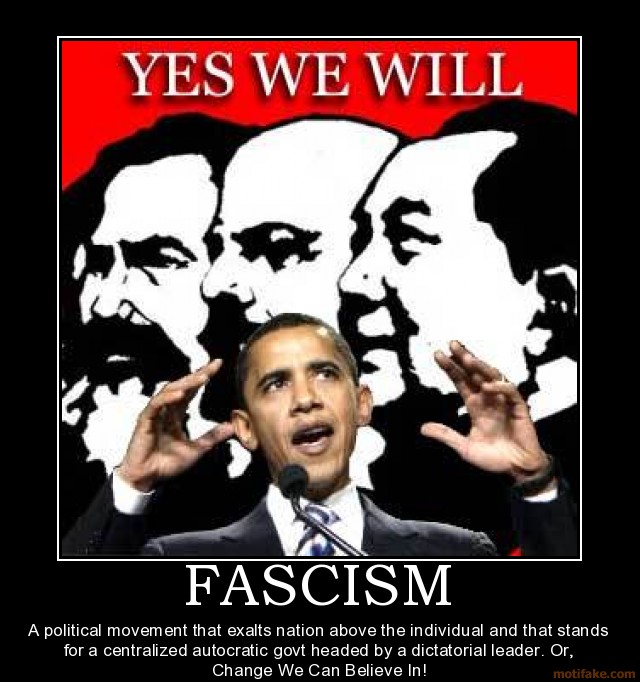
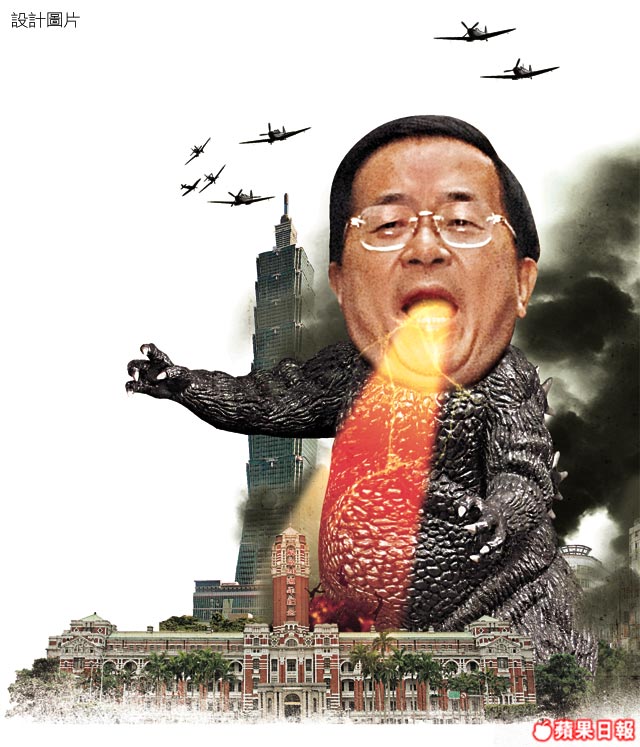
Taiwan president Chen Shui-bian as Godzilla
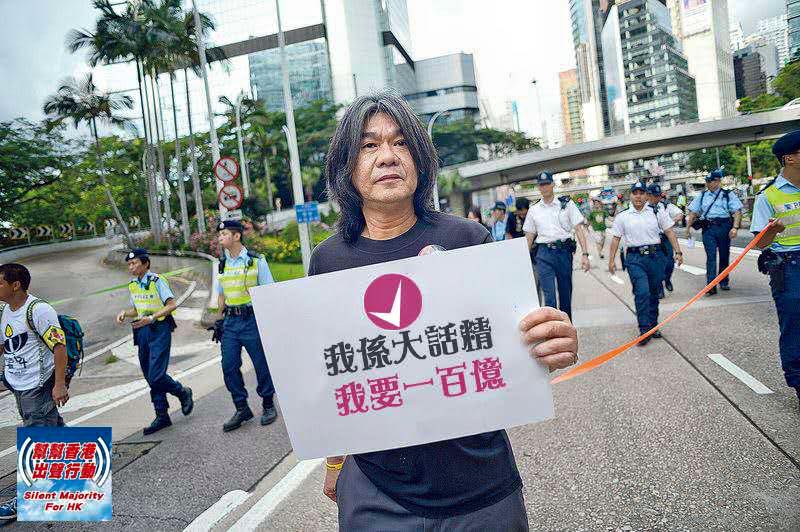
"Long hair" Leung Kwok-hung: "I am a big liar. I
want $10 billion."
-
Hong Kong Internet Article 23
Internet Article 23 (網絡23條) broadly
refers to a set of proposed ordinances regulating the internet in Hong
Kong. Under debate is the legality of derivative works popular on the
internet, including doujin drawings, kuso, parodies, and the modification
and adaptation of the lyrics in Hong Kong. The name "Internet Article 23"
comes from the controversial Hong Kong Basic Law Article 23 on national
security that detractors say would curb personal freedoms.
Many people believe that related
regulations will let the derivative work bear criminal responsibility
easily, including the modified or adapted song or pictures. As a result,
it strived to public opposition. Due to the opposition, the Government
shelved the amendment in May 2012. By July 2013 the Government launched a
consultation once again in order to let people discuss on how this type of
"parody works" can be exempted from criminal responsibility.
If "derivative work" is acceptable on the
Internet, then why not in real life? Get a life, Helena Wong Pik-wan!
- The website
HKG Pao has this photo already: " I want NO universal suffrage" with
the pan-democrats. Helen Wong Pik-wan is the second person on the left.

- Helena Wong Pik-wan selling towels with
caricatures of CY Leung at the 2015 Lunar New Year Fair in Victoria Park.
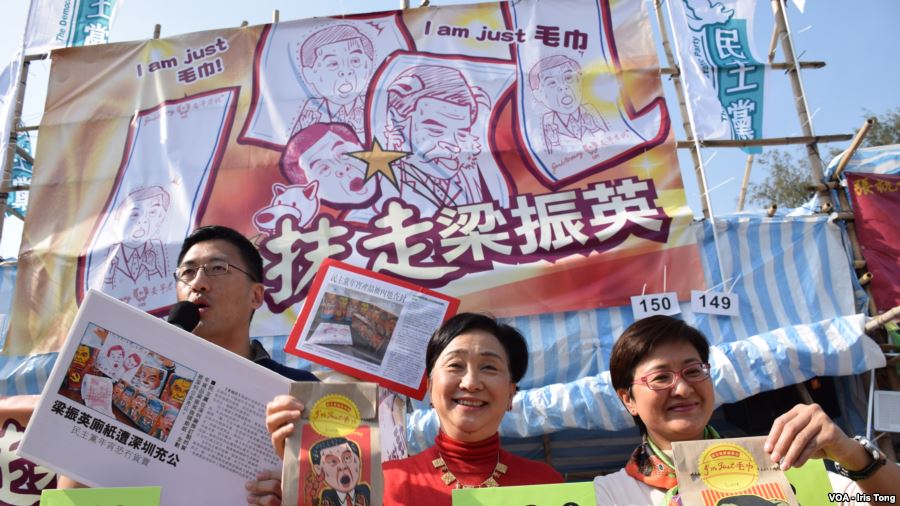
(SCMP)
Hong Kong’s Tiananmen vigil in spotlight amid growth of localism and alternative
rallies. June 4th, 2015.
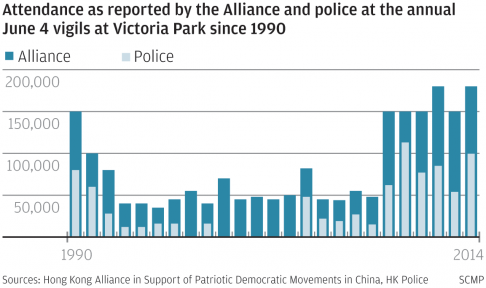
Hong Kong’s Victoria Park will become a
galaxy of candlelight tonight, just as it has been on every June 4 since
1990 to mark the anniversary of the bloody Tiananmen Square crackdown.
Tonight all eyes will be on if, and how,
the turnout for the annual candlelight vigil, which starts at 8pm, will be
affected by alternative rallies at other venues and the growth of localism.
More than 180,000 people attended last
year’s vigil in the park to call for vindication of those killed in 1989,
according to the Hong Kong Alliance in Support of Patriotic Democratic
Movements of China, which has organised the annual commemorative event since
its inception. The previous biggest turnout reported by the alliance was
180,000 in 2012. Police, however, put the turnout at 99,500, compared with
54,000 in 2013.
Many mainland Chinese visiting Hong
Kong are expected to join the vigil, with the city the only place under the
jurisdiction of Chinese authorities where people can observe the anniversary
in public and on such a large scale.
Civic Passion, a radical
pan-democratic group, will launch a bus tour from Causeway Bay at 4pm to
commemorate the pro-democracy movement, taking their supporters around all
18 districts in the city.
Leaders of student unions at several
universities have decided to skip this year’s vigil in protest at one of the
alliance’s slogans: to “build a democratic China”. The student unions of
four other universities, including the Chinese University of Hong Kong, will
give speeches at Victoria Park Meanwhile, the student union of the
University of Hong Kong will for the first time organise its own public
assembly on campus in Pok Fu Lam from 7.30pm, to give mourners an
“alternative” to the Victoria Park vigil.
The thought of localism has been
gaining ground among some young people in recent years among growing
anti-mainland sentiment. The term, along with the label “nativists”, has
emerged in the local political lexicon to refer to people who share an
ideology of focusing solely on Hong Kong affairs to the exclusion of all
things national.
The alliance, which was founded in
May 1989 to support student activists in Beijing and helped some student
leaders wanted by mainland authorities to escape, will be put to test this
year. According to a telephone survey conducted by the University of Hong
Kong’s public opinion programme from May 22 to May 28, the popularity rating
of the alliance dropped sharply to 44.6 marks, a record low since 1992. The
survey found 38 per cent of 1,089 respondents opposed disbanding the
alliance, versus 26 per cent who supported the idea. Some 52 per cent agreed
the official stand on the June 4 incident – described as a
“counter-revolutionary riot” – should be reversed, down from last year’s 56
per cent.
(Ming
Pao) June 4th and Localism. By Ching Cheong. June 3, 2015.
Today is the first June 4th after the
Umbrella Movement. Everybody is paying attention to the rapidly growing
Localism in the Umbrella Movement and its possible impact on this year's
June 4th memorial events.
I think that those who care about
local interests should strengthen their June 4th awareness and participate
in the June 4th memorial events. My reasoning is as follows:
Firstly, among those young friends
who advocate Localism today, June 4th is absolutely their enlightening
teacher in their maturing process. Perhaps they were just young children who
attended their first Victoria Park candlelight vigil while cradled by their
parents. In other words, they grew in the memory of June 4th. This is a
movement advanced by the broad masses of Hong Kong citizens and serves to
enlighten the next generation. We should not disregard it so lightly. As an
annual memorial event, it serves to silently raise our next generation.
Today Hong Kong has a new generation of young people who know right from
wrong and who have a strong desire for democracy.
Secondly, those friends who advocate
Locailism should know that in order to create a specific group identity,
there has to be a collective memory for this group. Such collective memories
serve to meld the group together. June 4th is a major collective memory in
the consciousness of the Hongkonger. It was precisely this quarter-century
of commemoration that differentiates the people of Hong Kong from the people
of mainland China. It has melded the Hongkongers together. Therefore
Localists should derive even more factors from the June 4th memorial events
to enhance the sense of sovereignty among Hongkongers.
Thirdly, Localists disagree with
certain June 4th narratives advanced by the Alliance to Support Patriotic
Democratic Movements in China, such as "vindication of the 1989 democracy
movement," "construction of a democratic China" and their methods such as
"observing the ritual as usual" and "peace, reason, non-violence, non-foul
language." But we cannot disregard history. The political demands of the
Alliance constitute the greatest common denominator for the people of Hong
Kong 25 years ago. This greatest common denominator was arrived at through
mediation, and that was why it could be sustained for 25 years. If the
Localism of the young people today was put forward in 1989, the candlelight
vigil might have have lasted long because the masses could not accept it.
For example, I opposed the use of the term "vindication" because it means
(1) we still accept the legitimacy of the Chinese Communists even after the
great massacre; (2) the people are still powerless and must beg the
authorities to render justice. But because most Hongkongers not normally
politically sensitive, a more radical demand would have alienated the
masses. Thus, I silently accepted the self-deprecatory term "vindication."
Thus, we must not negate everything that happened in the past using today's
norms.
Fourthly, the Localism has a myth
that we need only to "construct a democratic Hong Kong" without mentioning
"to construct a democratic China." They think that the China problem is too
complex to be promoted by Hong Kong. Therefore a more practical approach it
to "construct a democratic Hong Kong" and abandon any attempt to "construct
a democratic China." I disagree with this view for two reasons. (1) It
seriously understates how Hong Kong has advanced China along its way modern
civilization. If you cannot see the unique contributions of Hong Kong, you
will only have a sense of powerlessness under Communist rule; (2) It
pre-supposes that after separating from China, Hong Kong can live happily on
its own. There is nothing more impractical and unrealistic that this
pre-supposition.
Fifthly, Localism is not
isolationism. There is nothing good and everything bad about having a
Localism that tries to shut mainland China out altogether. China is such a
big country that they can shut themselves off from the rest of the world.
From 1949 to 1976, the Chinese Communists did just that. They regretted that
decision and changed to an open system in 1978. There is no example in
history of any form of isolationism with sustainable development. If the
Localists cannot overcome their narrow vision, they are only hurting Hong
Kong in loving it.
Over the past 25 years, the
persistence of the Alliance has made Hong Kong silently become the
conscience of Hong Kong. This is the pride of Hong Kong, and a brand that
Localists should be proud of. In truth, it is also our soft power to resist
the Chinese Communists. Therefore, even just for the sake of Hong Kong, we
should support, participate and strengthen the Alliance's memorial event. In
addition, the Localists should remind the Alliance that they need to review
their policies and methods to reflect current sentiments and find new
policies and methods to meet the new political demands.
(The
Stand News) Type 4 Students Worry Me The Most. June 4, 2015.
I have been following the public
opinion polls by the three universities about the constitutional reform.
Over the past couple of weeks, the support rate has been 3% to 10% more than
the oppose rate. The demographic analysis showed that the opponents are more
likely to be younger and better educated. For example, the May 10-14 data
showed that the opposition rate amongst persons 18-29 was 66% but only 20%
among those 60 or over. By education, the opposition rate among those with
university degrees was 62% but only 15% among those with primary education
only.
I have always wondered whether the
age difference was because young people have few burdens and can pursue
their ideals freely. Or could it be that the post-2000 higher education
opportunities provide them with better frameworks for thinking? Of course, both
can be true. But how much is the contribution of education?
So I turned to analyzing my own
secondary school students.
I'll start with Type 1 students.
Every school has students who are excellent in both character and
scholarship. These students are regarded as such by all the teachers and
students. Their exam results are always tops, they will politely nod to the
teachers that they come across and they never fight with anyone. They may be
many, but there are some in each class in each school. So are these students
Yellow Ribbons?
Actually, most Type 1 students do not
say much. If they say something, it will be that they don't fully understand
everything and have therefore drawn no conclusion. Most of them tend to even
think that certain people are making trouble (even if their demands are
reasonable). So they exhibit moderate "Blue Ribbon" thinking. Occasionally,
they will pose questions to the teachers. They may go down to Admiralty or
Victoria Park to observe. But they are definitely not Yellow Ribbons. They
won't shout slogans, but they will go to the scene to experience the
atmosphere in person. Even if they wear Yellow Ribbons, they will never be the
instigators of any action within the school.
Most Yellow Ribbons are Type 2
students. They have pretty good grades (but not the tops). I don't have to
worry about their studies, but they can obviously do better. They have
decent character, sometimes with a sense of justice. They like action more
than words, they are mischievous, they are rebellious in spirit. They are
students that teachers love and hate at the same time. During the National
Education campaign or the present constitutional reform, these students
participate at high rates. They will sneer at conservative remarks by
teachers. If they grow up and don't become policemen (or have no family
members in the police force), they will become the stalwart Yellow Ribbons.
The rest of the students are those
with lousy grades. Type 3 students are very quiet and have poor study
skills. They are not curious about world affairs. They do not take positions
on anything. When they grow up, they are suitable to become blue-collar
workers and housewives.
As for Type 4 students, they are very
active and they are very inattentive in class. They are forever destroying
public property and challenging the teachers. My observation is that none of
these people will ever be pro-government. Almost all of them wear Yellow
Ribbons. In the National Education debate, their idol was Joshua Wong. When
the Type 2 students form some concern group or the other, the Type 4
students will automatically join because they think that this is about
justice, freedom and liberation.
Yet these are the students who worry
me the most.
That is to say, they have no idea
what they are opposing. More precisely, they don't really understand what
they are opposing. During the period of the school strike, I gave them 10
minutes to stand on the dais to explain their ideas for the purpose of
discussion. What happened was that they couldn't even speak for one minute.
I don't know if they were too scared or too ignorant. What is the August
31st framework? What is this "genuine universal suffrage" that you are
fighting for? Can "guarding the last gate by casting a blank vote" really
work? Or even the most basic question: "What is democracy?" They couldn't
say anything.
"You can't give an answer? You are
very dangerous in this manner. This is not an issue of whether you are in
personal danger or not. What you believe in is in danger, because you are
going to kill it off just at the gestation stage." I always said.
Friends ask: "As a teacher, why don't
you teach them? You are obliged to do so."
"Actually much of our knowledge was
not taught to us by our teachers;
I can teach them. But after I taught them and they listened to me, what
then?
I can guide them, I can lay down the channels, but what if the water does
not flow over?
Can education be that useful? Or perhaps it is the basic quality of the
individual that is decisive?"
Hey, I really don't know.
- Link:
I'm a liberal professor and my liberal students terrify me. Edward
Schlosser. Vox.
(New
York Times) Letter from Overseas Chinese breaks silence on Tiananmen.
June 4, 2015.
They were born too late to remember the night
26 years ago when Chinese troops slaughtered hundreds of pro-democracy
student activists in the heart of Beijing. Many grew up hearing only
government accounts of the event, which paint the massacre as the
unfortunate conclusion to some vague political intrigue.
Nonetheless, this June 4, 11 Chinese
university students living overseas are trying to break through the official
silence with a widely circulated, passionately worded letter that encourages
their compatriots to learn more about the Tiananmen massacre — a watershed
event that has defined China ever since.
Written by University of Georgia graduate
student Gu Yi, and co-signed by 10 other overseas Chinese students, the
letter has become one of the few flashpoints as this year's anniversary
arrives, with Chinese authorities on guard against even the tiniest of
commemorations.
The letter remembers the government crackdown
that killed hundreds and possibly thousands of unarmed protesters and
onlookers. It demands that the Chinese leaders who gave the orders late on
June 3 and in the early morning hours of June 4, 1989, be held responsible.
"We do not ask the (Chinese Communist Party)
to redress the events of that spring as killers are not the ones we turn to
to clear the names of the dead, but killers must be tried," the letter
reads. "We do not forget, nor forgive, until justice is done and the ongoing
persecution is halted."
An online copy of the document has reached
readers in China with the help of software that let PDFs get past Chinese
censors, Gu said. The document has already drawn a strong rebuke from the
Communist Party-run Global Times, which said in an editorial that the
students "harshly attacked the current Chinese regime, twisting the facts of
26 years ago with narratives of some overseas hostile forces."
Gu said he was addressing Chinese students who
had not seen the troves of photos, film footage and eyewitness accounts
about the massacre that he came across only after he left China to study.
"All they need to know is actually very simple," Gu said. "Some people died,
and some people killed them. If you understand that, you don't have to
understand a lot more."
In what's become an annual ritual, Chinese
police were stepping up their vigilance in the capital Thursday to prevent
any remembrance of the event. References to the massacre are nowhere to be
found in Chinese media, and censors scrub social media posts that mention
the event or its date.
In the only major act of commemoration in
China, thousands of people in the semi-autonomous Chinese city of Hong Kong
are scheduled to hold their annual candlelight vigil Thursday.
Gu said he was not worried how the letter
would affect his chances of returning to his home country free from official
harassment. He said his family had not run into any trouble yet from the
authorities, although police had contacted the relatives of some of the
co-signers. "I can't do something always thinking about how this will affect
me," Gu said. "Sometimes, it's just the right thing to do."
The students' letter was not the only one to
mark the anniversary. A group of relatives of those killed in the massacre
also issued a statement demanding that Chinese leaders be brought to justice
and that the victims' families win compensation.
Foreign Ministry spokeswoman Hua Chunying
responded Tuesday to the relatives by arguing that the country's rapid
economic growth over the past 26 years justified the crackdown. "As for the
political turmoil that happened in the late 1980s, the Chinese government
and party have already made a clear conclusion," Hua said. "The great
achievements China made during the past 30 years in the practice of reform
and opening-up have shown that China's development path is absolutely
correct, and wins resolute supports from 1.3 billion Chinese people."
So far, such acts of dissent haven't
penetrated what's been a remarkably successful campaign by Chinese
authorities to erase Tiananmen from the collective memory, said Willy Lam, a
political analyst at the Chinese University of Hong Kong. "It is still
important to the extent that it shows that the generation of Chinese who
were born after Tiananmen Square are still eager to find the truth and
defend the truth," Lam said of the students' letter. "Still, it's difficult
to see what kind of impact it would have, whether it would make a dent in
this so far quite effective strategy by the authorities to impose amnesia on
June 4th."
(Oriental
Daily) June 4th, 2015.
About 50 people attended the discussion forum
on "Localist significance for building a democratic China." Four Localism
Power members came and raised red banners with the words "The Alliance to
Support Patriotic Democratic Movements in China should scram back to
Chink-land!." They told Democratic Party legislator Albert Ho Chun-yan to go
back and watch adult video at the Legislative Council. Ho countered that
these people were "communist agents" who "were being paid." Volunteers went
up to intercede, quarrels took place, physical shoving occurred and people
fell. The police arrived to mediate. A Localism Power member broke his
eyeglasses and demanded monetary compensation.
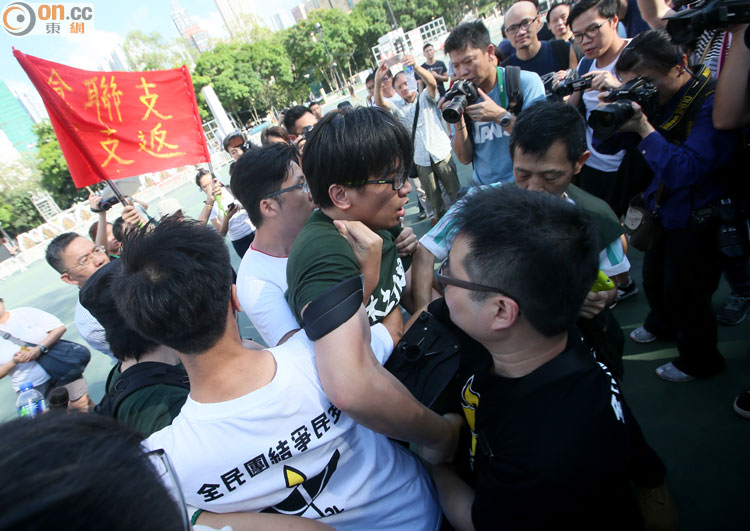
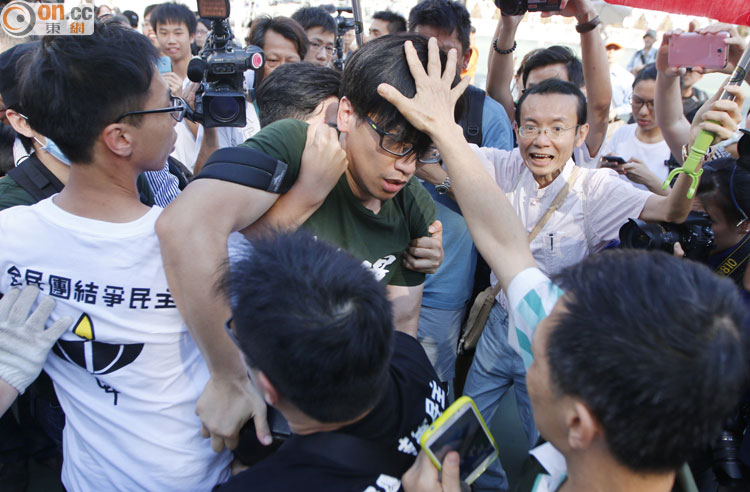
(Oriental
Daily) June 4, 2015.
Civic Passion and Voice of Loving Hong Kong
each have street booths outside the Tin Hau MTR station today. A large
number of police officers are present to keep the two sides apart.
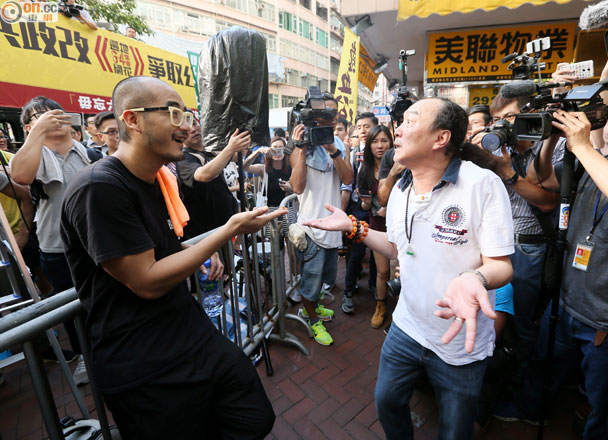
Civic Passion is using June 4th to promote
their opposition to the constitutional reform proposal. They said that June
4th proved that the Chinese Communist regime is murderous and we should
harbor more illusions about them. They said that Hong Kong culture, language
and economy are colonized by the Chinese Communists already. If the
constitutional reform is passed by the Legislative Council, then this means
Hongkongers are accepting Chinese Communist intervention in Hong Kong
politics.
Voice of Loving Hong Kong said that
commemorating June 4th is not the sole privilege of the Alliance to Support
Patriotic Democratic Movements in China. Chairman Ko Tat-bun accused the
Alliance to taking in huge amounts of donations without disclosing how they
were being spent. Ko also said that that the central government has defined
the June 4th incident as a "crisis" and so there is no need to argue any
further.
(SCMP)
Thousands flock to Hong Kong’s candlelight vigil and other events to mark
Tiananmen crackdown. June 5, 2015.
Thousands flocked to this year’s
candlelight vigil in Victoria Park to mark the 26th anniversary of the 1989
Tiananmen Square crackdown, but turnout fell from last year's record 180,000
attendance. Organisers of the vigil, the Hong Kong Alliance in Support of
Patriotic Democratic Movements of China, estimated the turnout for the event
at 135,000 but the police estimated the crowd numbers at just 46,600.
Student union representatives from four
universities - Chinese University, University of Science and Technology,
City University and Polytechnic University - took turns in addressing the
crowd from the main stage in Causeway Bay. While condemning the bloody
crackdown, the student leaders also lambasted Beijing for handing down a
restrictive framework for universal suffrage in Hong Kong. In their speeches
they said the Basic Law's provision on universal suffrage was not being
respected by Beijing. They then burned a copy of Hong Kong's
mini-constitution on stage. Sunny Leung Hiu-yeung, external vice-chairperson
of City University's students union, said their action was a protest against
the Basic Law, which he said was a tool Beijing used to manipulate Hong
Kong's democratic development. "We are fighting for amendments to the Basic
Law [and want] Hongkongers to participate in the process," he said. The
student representatives also said a march to the central government's
liaison office in Western district would take place after the vigil.
Before this, taped speeches by former
Tiananmen student leaders and messages relating to the Occupy movement were
aired on the main state. Wang Chau Hua, a 1989 student leader who is ranked
14th on a list of 21 leaders wanted by the Beijing authorities, spoke from
Los Angeles. Wang drew a link between the democratic movements of Hong Kong
and China. "The continuous commemoration of June 4 in the last twenty years
or so has been a lesson of politics and democracy for many young [Hong Kong]
people," she said. "I believe that is why they stood up so courageously in
the Umbrella Movement to fight for universal suffrage."
A taped speech by Zhang Yanqiu, wife of the
deceased Wang Zhiying who was shot dead in 1989, was also played at the
vigil. She called for state leaders to "pluck up the courage and shoulder
the historical responsibility" for the Tiananmen crackdown.
On Occupy, Wang Yixing spoke for her
husband Wang Cang, a poet who had been detained since last October after he
offered his support to the city's so-called "umbrella movement" last year.
Wang said her family had been forced to
move since her husband's arrest, and that he had been tortured by mainland
authorities. "I sincerely thank all internet users from all over the country
for supporting and helping us," she said. At the start of the event at 8pm,
vigil-goers dressed in black or white filled up all six football pitches in
Victoria Park, with latecomers taking up surrounding positions. The turnout
was apparently encouraging for the organisers after many localist
groups opted to hold alternative commemorative events across the city.
According to previous University of Hong
Kong (HKU) estimates, six football pitches can accommodate up to 41,900
people. More than 180,000 people attended last year’s vigil in the park to
call for vindication of those killed in 1989, according to the Hong Kong
Alliance in Support of Patriotic Democratic Movements of China, which has
organised the annual commemorative event since its inception. The previous
biggest turnout reported by the alliance was 180,000 in 2012. Police,
however, put the turnout at 99,500, compared with 54,000 in 2013.
Meanwhile, at a separate vigil organised at
the University of Hong Kong, the focus of the evening was on mourning and
paying respect to those killed in the events of 1989. At 7.50pm, the HKU
vigil started with the host explaining the ethos behind the event. "Our
vigil won't have any fund-raising or souvenirs because this is not a
carnival. We won't sing songs together, nor would we ask you ... to give
yourself a round of applause ... What we have here is respect for the dead,"
the host said. The opening speech was followed by a minute's silence with
about 10 students taking to the stage, representing the students' unions of
Chu Hai College of Higher Education, HKU, and the Baptist, Lingnan and Open
universities.
At an alternative rally taking place in
Tsim Sha Tsui, up to 790 people gathered to mark the anniversary. Young
people made up the majority of rally-goers under the clock tower on the
harbourside, as they listened to speeches given by Civic Passion members
about why priority should be given to local affairs, and why a rethink of
Hongkongers' role in China's democratic movement is necessary. "The alliance
is behind the times, whether it is in the form [of commemoration] or in its
demands," said one speaker surnamed Yeung, 22, who works in the insurance
sector. "Patriotism has now become a controversial subject and it shouldn't
have been the focus in the first place," he said, who still attended the
Victoria Park vigil until last year. "It's easier to reach consensus if we
focus on, say, holding the culprits for the massacre responsible."
(EJinsight)
June 5, 2015.
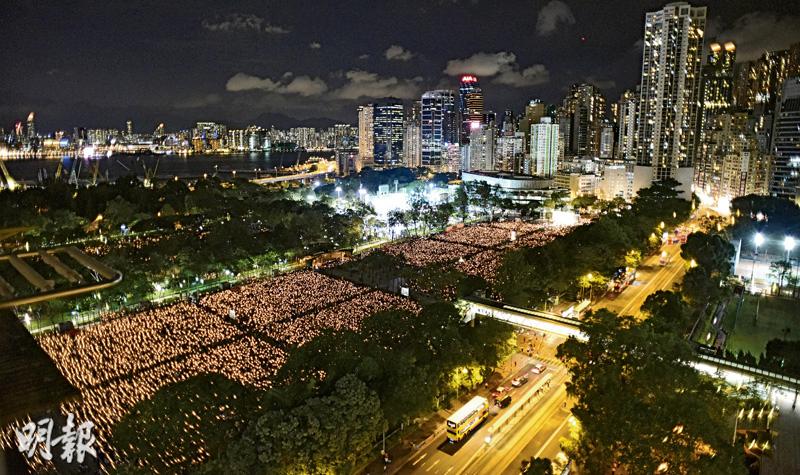
The annual June 4 candlelight vigil in
Victoria Park to commemorate the victims of Beijing’s 1989 Tiananmen Square
crackdown saw much fewer participants on Thursday compared to recent years.
The Hong Kong Alliance in Support of Patriotic Democratic Movements in
China, organizer of the annual event, said about 135,000 people turned up
for the vigil last night, compared with a record 180,000-plus people who
took part in the activity last year. It is said be the lowest turnout since
2009. The police, meanwhile, put the number of attendees at 46,600 at the
peak, down more than half from the 99,500 estimated last year.
Observers said the participation at
Victoria Park fell as a new venue
was set up on the campus of the University of Hong Kong (HKU) for the first
time to mourn the victims of China’s June 4, 1989 crackdown on pro-democracy
activists. But even
adding the figure from the HKU event, the total turnout this year for the
commemoration was much lower than in previous years, Ming Pao Daily
reported. About 2,000 people are said to have shown up at the event
organized by a group of HKU students. The students organized an alternate
event as they didn’t agree with the Victoria Park vigil organizer’s guiding
principle of “building a democratic China”.
The
Alliance chairman, Albert Ho, meanwhile sought to play down the reduced
participation at their annual event. The turnout of 135,000 is a very
significant figure, and shows that Hong Kong people still care very much
about June 4 incident, he said.
The Alliance changed the tone of the event
this year to cater to young people by linking June 4 to the local
pro-democracy movement. It prompted people to sing “Raise your umbrellas”,
the theme song of the Umbrella Movement last year, rather than mandarin
songs for civil movement. Yellow umbrellas, symbols of the 2014
pro-democracy Occupy movement in Hong Kong, could be seen at the event last
night.
As for
the HKU event, participants there mourned only for ten minutes before they
proceeded to an academic forum. The students did not chant slogans or sing
songs, unlike the gathering at Victoria Park. Claiming that their only
responsibility is to guard Hong Kong, HKU students union president Fung
King-yun said the group is yet to decide whether to hold the June 4 event
again next year.
A survey carried out by Ming Pao found that
many people who came to the HKU event had been regular participants at the
annual candlelight vigil in Victoria Park in the past.
Eighty-five percent of people polled said they had joined the annual vigil
in the Victoria Park before. Half of them said they came to the HKU event as
they wanted to mourn the June 4, 1989 victims but didn’t want to participate
in the Alliance event.
(EJinsight)
June 5, 2015.
Four university student unions used Thursday’s memorial for Tiananmen
victims to denounce China for suppressing democracy in Hong Kong.
They burned copies of the Basic Law, Hong Kong’s mini
constitution, and urged people to continue the fight for freedom and
democracy, Apple Daily reported Friday. The students were from the Chinese
University of Hong Kong, Hong Kong Polytechnic University, Hong Kong Shue
Yan University and City University of Hong Kong.
Student union representatives from
the four schools gave speeches in which they demanded changes to the Basic
Law, saying its interpretation should be up to Hong Kong people, not the
Chinese parliament.
Tjhan Hillary, external vice president of the Shue Yan
University student union, said Hong Kong people face a situation similar to
that of the Beijing students in 1989 when they were stripped of their basic
rights. Hong Kong Polytechic’s Wong Yuen-ling said democracy in Hong Kong
has been eaten away by the Basic Law. Twenty-six years ago, students in
Beijing would not have accepted anything similar to a Beijing-backed
political reform proposal that is being forced on Hong Kong people, Wong
said.
(Commercial
Radio) June 6, 2015.
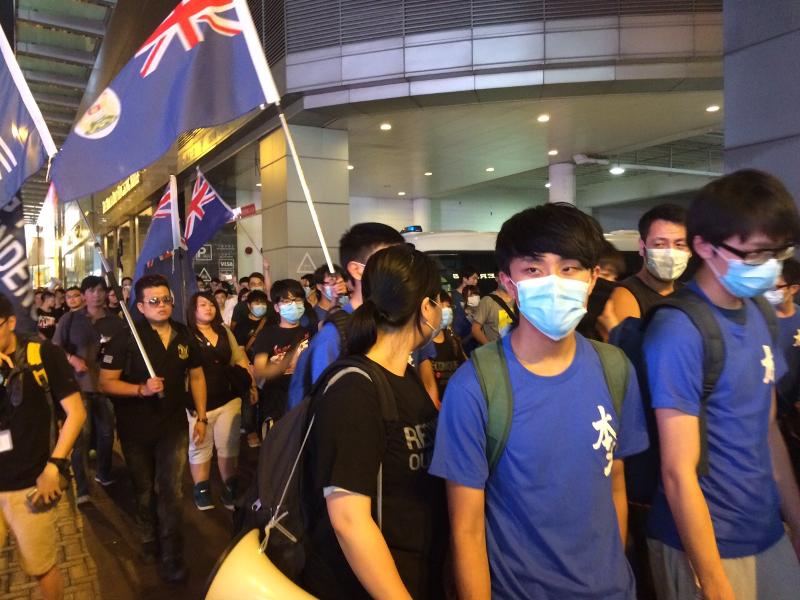
Several hundred persons attended the June 4th
evening assembly by the Tsim Sha Tsui clock towers. After the organizers
Civic Passion announced that the event was concluded, about 20 Hong Kong
Indigenous Democratic Front continued on down Salisbury Road to Canton Road.
They shouted "Down with the Communists," "Build the Hong Kong nation" and
"Hong Kong independence." Some of them hoisted British colonial flags. At
one point, they attempted to charge into the shopping mall. Afterwards they
marched down Haiphong Road towards Nathan Road.
(Oriental
Daily) June 5, 2015.
As the demonstrators turn into Nathan Road, a
shop worker came out to curse them out. The police had to separate the two
sides. A man and a woman also got into arguments with the demonstrators and
the police escorted the two out. A diner at a noodle shop came out to
quarrel with the demonstrators, and was surrounded. The police came and took
the man back inside the noodle shop. The noodle shop lowered its gates to
the cheers of the demonstrators. The demonstrators marched to the Miramar
Mall where they dispersed.
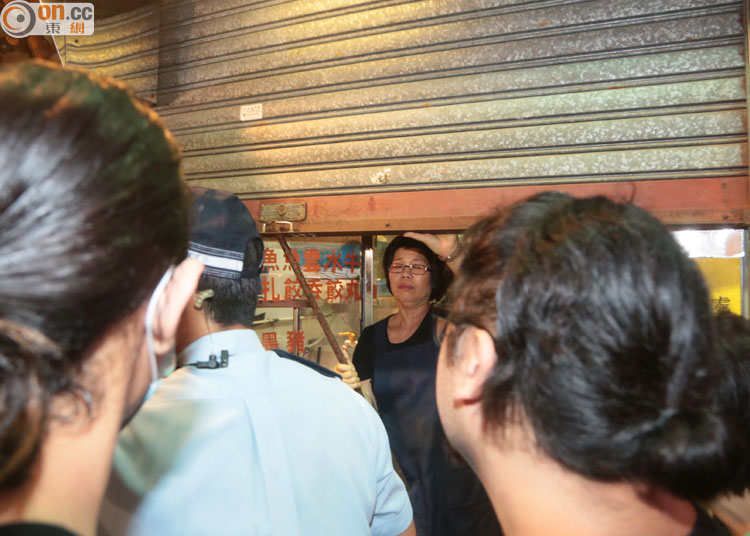
(Ming
Pao)
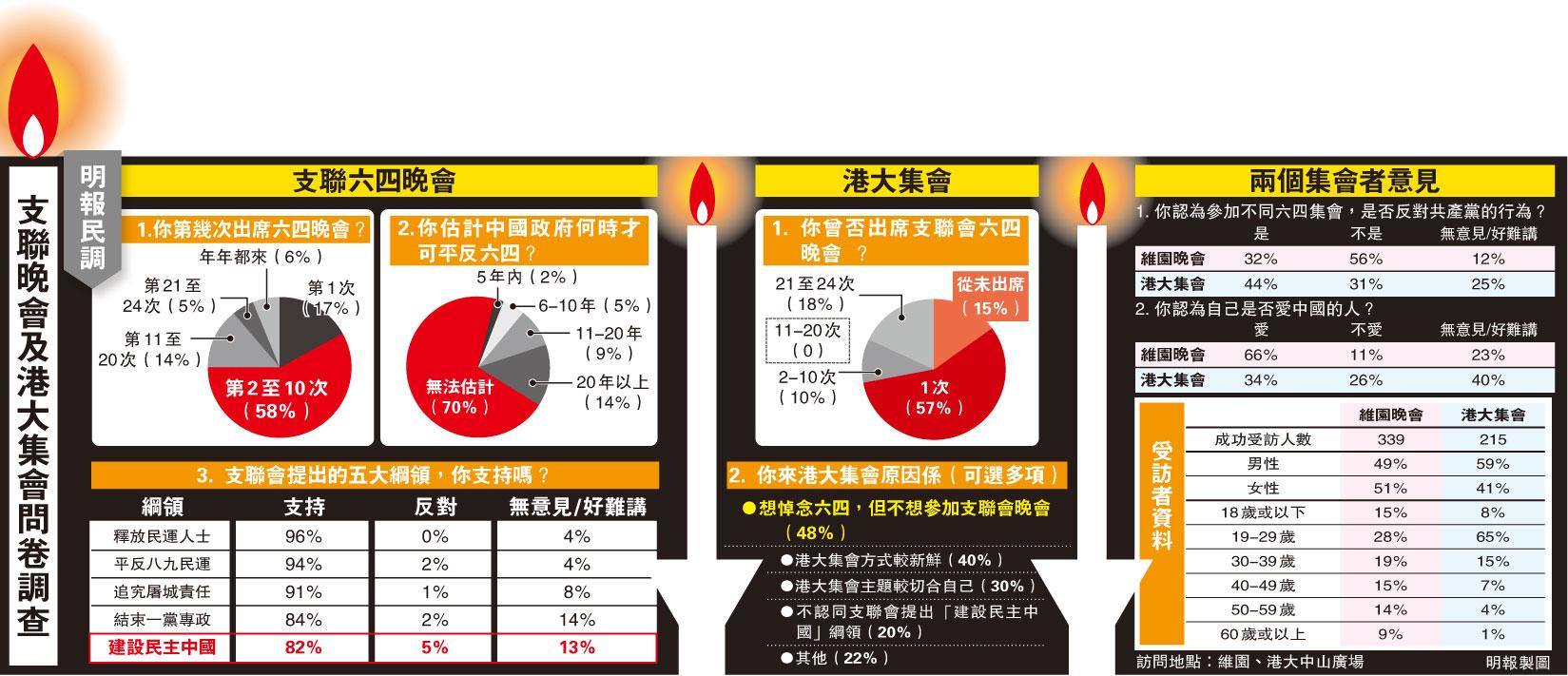
Ming Pao interviewed 339 Victoria Park
participants and 215 Hong Kong University participants.
Victoria Park
Q1. How many times have you attended the
June 4th evening assembly?
17%: First time
58%: Two to ten times
14%: Eleven to twenty times
5%: Twenty-one times or more
Q2. When do you think the Chinese government
will vindicate June 4th?
2%: Within 5 years
5%: 6 to 10 years
9%: 11 to 20 years
14%: More than 14%
70%: Impossible to guess
Q3. Do you support the five policies of the
Alliance to Support Patriotic Democratic Movements in China?
96%: release democratic activists
94%: vindicate the June 4th democracy movement
91%: hold accountability for the massacre
84%: end one-party rule
82%: construct a democratic China
Q4. Do you think that attending the June 4th
assemblies are anti-Communist activities?
32%: Yes
56%: No
12%: No opinion/hard to say
Gender distribution:
49%: Male
51%: Female
Age distribution
15%: 18 or under
28%: 19-29
19%: 30-39
15%: 40-49
14%: 50-59
9%: 60 or over
Hong Kong University
Q1. Have you attended the June 5th evening
assembly held by the Alliance?
15%: Never
57%: Once
10%: 2 to 10 times
0%: 11-20 times
18%: 21 times or more
Q2. Why did you come to participate in this
gathering? (multiple choices allowed)
48%: To commemorate June 4th, but not going to the Alliance evening
assembly
40%: The HKU assembly is fresher in form
30%: HKU's themes are better suited for me
20%: Disagreement with the Alliance's platform of constructing a
democratic China
22%: Other reasons
Q3. Do you think that attending the June 4th
assemblies are anti-Communist activities?
44%: Yes
31%: No
25%: No opinion/hard to say
Gender distribution:
59%: Male
41%: Female
Age distribution
8%: 18 or under
65%: 19-29
15%: 30-39
7%: 40-49
4%: 50-59
1%: 60 or over
(SCMP)
June 4 vigil organisers agree on need for new direction for annual Hong Kong
ceremony. June 6, 2015.
Veterans of the Hong Kong Alliance in
Support of Patriotic Democratic Movements of China, which organises the
annual candlelight vigil marking the anniversary of the crackdown against
the 1989 pro-democracy movement, agree the group needs to be reformed after
the turnout this year hit its lowest level since 2008.
While the alliance's secretary, Lee
Cheuk-yan, said the 26-year-old group should try harder to link the ceremony
with Hongkongers' pursuit of democracy in the city, another founding member,
the Reverend Chu Yiu-ming, admitted that the younger generation might not
now share the beliefs held by the organisers.
The pair's remarks came amid a fall in the
turnout for the vigil - from 180,000 last year to 135,000 people on
Thursday. The organisers received donations totalling HK$1.34 million,
including more than 10,000 yuan. The total is down HK$431,000 on last year's
figure.
"Some young people have reservations about
the alliance's slogan - to build a democratic China - amid an identity
crisis," Lee said. "But we believe [the goal] … is still closely related to
Hongkongers as we need to fight the Communist Party to achieve democracy."
Lee, however, agreed that the alliance
should do more than presenting the truth about the crackdown at future
events, so that young people become more involved in the movement.
Meanwhile, Chu said it was very natural for
his generation to link the fate of Hong Kong with that of the mainland given
the crisis they experienced in the 1980s about the city's handover in 1997.
"Back then, we believed that if China turned democratic, the city's crisis
would be resolved," he said. "Now 18 years after the handover, perhaps
people can figure out how they want [the democratic movement] to proceed. I
would not rule out their options." He welcomed the fact the young were
adopting their own methods in fighting for the vindication of the 1989
movement - as long as they did not unreasonably attack others who decided to
do it in another way.
Chu, a co-founder of the Occupy Central
movement, also defended the annual candlelight vigil against claims it was a
cowardly approach, as suggested by some "nativist" groups. "My heart sinks
whenever I recall the plight of the Tiananmen dissidents - how they were in
exile or being jailed - on June 4 every year. I have to look back at this
incident and must tell the next generation what has happened," said Chu, who
helped get about 150 dissidents out of the country after the crackdown.
(SCMP)
Pan-democratic heavyweights warn of risks in revising Hong Kong's Basic Law.
June 8, 2015.
A fresh dilemma is looming for mainstream
pan-democrats as their allies from civil rights groups advocate an amendment
to the Basic Law as a new direction in the pursuit of genuine universal
suffrage when the present debate on reform ends.
Trying to revise the city's mini-constitution
is too time-consuming, if not downright dangerous, according to pan-democrats
including Civic Party chairwoman Audrey Eu Yuet-mee and Democratic Party
chairwoman Emily Lau Wai-hing.
The law in question is Article 45, which
stipulates only a nominating committee can name chief executive candidates
when universal suffrage is introduced. The idea of amending it became the talk
of the town after leaders of the student unions of four universities burned a
copy of the Basic Law last week, during an annual candlelight vigil at
Victoria Park commemorating the Tiananmen Square crackdown.
Lau noted the students' frustration over
stagnating democratic development. But modifying the law was fraught with
danger as it would open the way for Beijing to tighten constitutional
provisions that had protected Hongkongers' rights and freedom, she warned
yesterday. "[I] do not oppose any discussion … but we must be very careful in
dealing with the matter, which is full of traps," she said.
At the burning of the book on Thursday, the
student leaders argued Article 45 served only the interests of Beijing and
tycoons.
The tertiary students' action was akin to
"dropping a bombshell", Civil Human Rights Front convenor Daisy Chan Sin-ying
said. Nevertheless, she said, they had floated a new idea that deserved more
debate after the legislature, as expected, voted down the government's offer
of "sham universal suffrage" this month. The Federation of Students, the
city's oldest and the most politically active pupil group, also backed
amending Article 45.
But key pan-democratic politicians echoed
Lau's reservations about the idea. Civic Party leader Alan Leong Kah-kit, who
convenes an informal grouping of 23 pan-democratic lawmakers, said effecting
changes to the Basic Law was not their top priority now. "What we want to do
is to get the central government to honour its promises, delivered to Hong
Kong since the 1980s and enshrined in the Basic Law," he said. His party
colleague Eu pointed out an amendment would take a very long time and was not
necessary to achieve universal suffrage. Burning the Basic Law book might give
the public the impression the students opposed the "one country, two systems"
principle although they might not mean it, she said.
Internet comments:
- Vindication this year! The Chinese
Communists were vindicated for their actions on June 4th 1989, after the
Occupy Central episode in Hong Kong last year. After 79 days during which
the city center was occupied and paralyzed, more than 80% of Hongkongers
agreed that the police must clear the occupiers out. The 79 days of non-stop
news coverage also made Hongkongers appreciate that the Chinese Communists
were right in clearing the occupiers out of Tiananmen Square on
June 4th 1989.
- The comparison of June 4th versus September 28th, or 1989 Democracy
Movement versus Occupy Central is not completely true. Here is one
difference: (YouTube)
Student leaders Wang Dan and Wu'er Kaixi humiliated Premier Li Peng by
meeting him while dressed in pajamas, whereas student leaders Alex Chow and
Joshua Wong never got a chance to meet with Chief Executive CY Leung. But
maybe Leung learned from Li's case not to bother.
- Also, when the Chinese students occupied Tiananmen Square, their enemy was
the Chinese Communists. But when the Hong Kong students occupied Admiralty/Mong
Kok/Causeway Bay, their enemy was the people of Hong Kong.
- Donate money now, or the goal of June 4th
will not be realized
We ask young people to share their allowance money
[cash box for the Alliance to Support Patriotic Democratic Movements in
China]
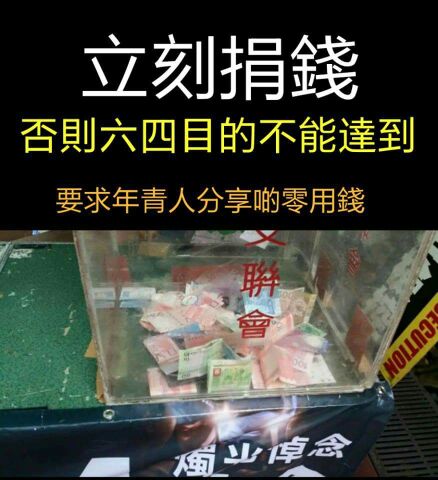
- Money is needed to fund the
June 4th Museum.
Of course, the museum charges a $20 admission fee.
- (Oriental
Daily) More than 20 demonstrators stood outside the June 4th Museum
and chanted slogans such as "Lee Cheuk-yan, you lie!" They said that the
Alliance raised $1.7 million in donations, but spent 70% for administrative
purposes. They accused Alliance secretary Lee Cheuk-yan of profiteering for
himself while inflating the casualty count to swindle emotions and money.
Lee Cheuk-yan said that they used the casualty figure of 200 deaths from the
Mothers of Tiananmen Square and the 3,000 casualties from the Red Cross. As
for the expenses, 70% of the administrative fees were used to pay the
mortgage of $20,000 per month for the June 4th museum. As for the separate
memorial service for the PLA soldiers who died during the Tiananmen Square
incident, Lee said that those were soldiers who shot civilians and therefore
he won't attend.
- For 364 days a year, you call the
mainlanders "locusts" and "mainland A's." For one day of the year on June
4th, you call them "compatriots". So what are they really to you?
- Come midnight and it's June 5th. They back to being pumpkins.
- When you solicit donations, you refer to the mainlanders as "compatriots."
After you turn your back, you refer to them as "locusts."
- When you go to the discussion forum and you find the word "compatriot" in
the subject title, you know that this must be June 4th. Nobody uses that
term the rest of the year.
- In prior years, many mainlanders make special trips to Hong Kong just to
attend the Victoria Park candlelight vigil. This year, they will get their
suitcases kicked by the valiant warriors of the Valiant Front/Localism
Power/Hong Kong Indigenous/Civic Passion.
- The schizophrenic personality: Hanging out the "I am not Chinese" banner
while commemorating patriotic Chinese compatriots:
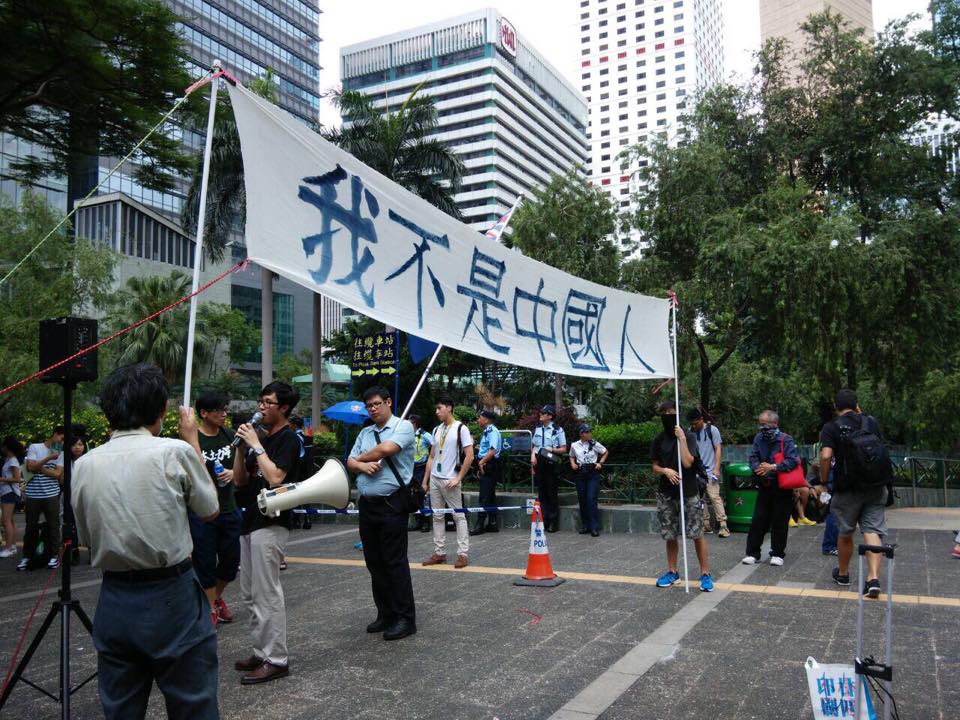
- Democratic core value: Whenever you disagree
with someone, you call them Communists agents who are being paid to disagree
with you.
- Well, there is
Psychological projection: "The theory in psychology in which humans
defend themselves against unpleasant impulses by denying their existence in
themselves, while attributing them to others." When Albert Ho took money
from Jimmy Lai, he can perfectly rationalize to himself as supportive of his
own initiatives which exist on their own already. But if other people take
money, he is absolutely sure that the agenda is being set for them in
exchange.
- The pre-game show between the Alliance and
Localism Power makes no logical sense whatsoever:
(1) On one side, the Localism Power people who want to expel all locusts
show up at an event to commemorate Chinese compatriots
(2) On the other side, Albert Ho, the guy who took in secret donations,
accuses the Localists of being paid
(3) When fisticuffs broke out, both sides decided to call the Evil Black
Police Dogs to mediate.
- (RTHK)
Citizen Mr. Leung has attended the June 4th evening assembly for more than
20 years. He understands why the Hong Kong Federation of Students and others
are no longer participating, for the Alliance to Support Patriotic
Democratic Movements in China has been doing the same old thing and chanting
the same old slogans without any substantive action. He is somewhat
disappointed with the Alliance. For him, the difference this year is that
most of the young people have vanished ...
- Dear Mr. Leung, substantive action means going to mainland China and
actually trying to do something. You are asking too much of the Alliance
which does not see the value of unnecessary sacrifice. Their idea of
substantive action is for you to donate more money to them. So just give
them a few thousand dollars and you can feel good about yourself.
- (Oriental
Daily) July 4, 2015.
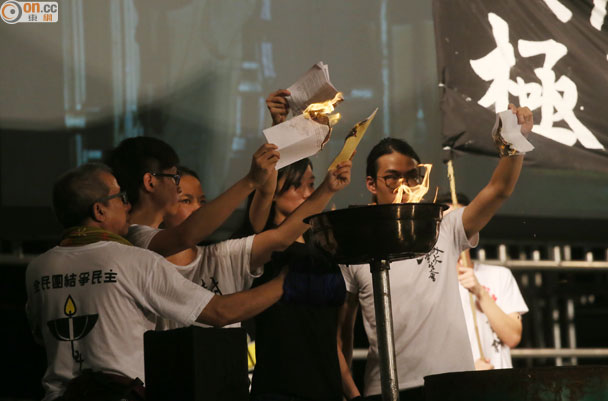
Since the Hong Kong Federation of Students
is no longer participating, student representatives from Chinese
University of Hong Kong, City University, Polytechnic University and Shu
Yan University took their place. They presented flowers and lit the torch.
Then the student representatives took out a copy of the Basic Law and set
it on fire. At the same time, the organizers brought out two black banners
with the white words: "Politics and business are collapsing; the
authoritarians have no moral; destiny determined by oneself; Hong Kong
people amend the constitution." So while the assembly was supposed to
gather to commemorate June 4th 1989, it was hijacked this time for the
politics of constitutional reform.
They also sang "Raise the Umbrella" this time
and thereby co-branded the June 4th candlelight vigil with Occupy
Central/Umbrella Movement. Do they realize that the brand has negative brand
equity?
- (Speakout
HK) Chinese University of Hong Kong Student Union president Wong
Ching-fung on radio: "Actually this action was very rational. We see that
there are problems with the system. Therefore we want to use this action to
start mass discussions. So far this has been very successful." Hey, you want
to amend Article 45 of the Basic Law, and you do this by setting the entire
Basic Law on fire? The radio host said: "Next time, if you are
dissatisfied, shouldn't you just burn those articles in the Basic Law that
you are not satisfied with as opposed to the whole thing?" Wong
replied: "If you just rip up a few pages ... that is, you just burn a few
pages ... that it seems ... it seems to be somewhat funny."
- The Alliance
to Support Patriotic Democratic Movements in China wants to support a
pro-democracy Occupy
Wangfujing/CBD
movement in Beijing. If they don't get their way after 79 days, they will
lay siege to
Zhongnanhai. This is the model of success that they want to export
to the Chinese compatriots.
- For the first time in 26 years, there were no
ensemble songs in putonghua sung tonight. A recording of the
traditional
Blood-dyed Glory was played on the broadcast system only after the event
was declared over and people filed out.
The
Wounds of History (in putonghua) and
Chinese Dream (in Cantonese) were dropped.
- This is getting to be strange when an event to support patriotic
democratic movements in mainland China is indifferent (or even hostile) to
the mainland Chinese.
- If they kill off the Basic Law and eliminate
One Country Two Systems, what is the most likely replacement? One Country
One System with direct Chinese Communist rule? Or Two Countries Two Systems
with an independent Hong Kong City-State nation? I'll bet on the former (for
being more probable and not because I like it).
- (Ming
Pao) Professor Joseph CW Chan was surprised when he saw the students
burn the Basic Law on stage in Victoria Park. He thought the evening
assembly had been hijacked and so he left to show his displeasure. "The
Basic Law is the only thing that protects civil liberty, law and human
rights. Diminishing the significance of the Basic Law is very dangerous." He
said that the students proposed to amend the Basic Law, which he says will
only trigger the central government into amending the Basic Law in
accordance with its predilections. "You should start worrying when the
central government agrees with you to amend." Chan also thought that playing
the localist songs such as "Raise the Umbrella" caused the assembly to lose
focus. "Some citizens came to Victoria solely to commemorate June 4th,
including quite a few who made special trips from the mainland."
Progressive Lawyers Group convener Kevin Yam
said "many people have spent a lot of time criticizing the rulers for
disrespecting the Basic Law, but the students show up now and burn the Basic
Law. It may cause people to think that it is the students who are
disrespecting the Basic Law. This is a complication on the way to
democracy."
Civic Party legislator Dennis Kwok Wing-kin
said that the Basic Law articles on human rights, freedom and independence
of the judiciary are invaluable. "But if the students think that some
articles should be amended, then what are they suggesting when they set the
(whole) Basic Law on fire on stage?" Kwok said that the students were
unwise.
- (Speakout
HK)
Strictly speaking, it is not illegal to burn a
copy of the Basic Law. But the sole meaning is a negation of the Basic Law
as well as One Country Two Systems. If they believe that certain articles of
the Basic Law are imperfect, the Basic Law contains a mechanism for
amendments. All they have to do is follow the process. But these students
have so far said nothing about the contents of the Basic Law, or which
articles are imperfect, or how to amend the Basic Law. They have said
nothing. All they have done is set a copy of the Basic Law on fire.
The burning of the Basic Law is the negation
of the Basic Law. Society has to choose between two possible responses. On
one hand, the people agree with the students and overthrow the government
to establish a new constitution. On the other hand, the people must condemn
this behavior. The students cannot pretend to be unaware. They should tell
society whether they negate the Basic Law and want to toss One Country Two
Systems aside? The pan-democrats and the Alliance should also state their
position on this matter, or else they run the risks of blowbacks.
During the 79 days of Occupy Central, the
anti-government anarchists kept saying "Nobody represents me" while
insisting "you all must heed what I say." Of course, we can listen to you
but what is your reasoning? For example, in the present case, why did you
burn the Basic Law? What happens after you burn it? What should we do next?
Please give us a clear timetable and roadmap ...
- Revolution? See Stephen Chow's dialogue from
The Deer and The Cauldron:
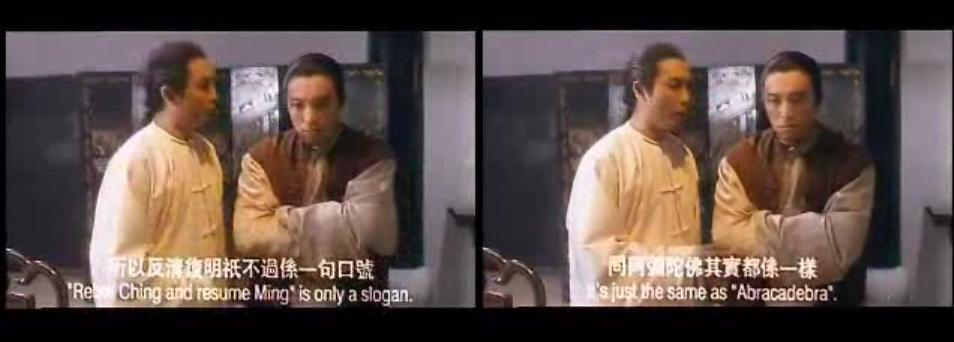
- (Wikipedia)
|
Anniversary |
Year |
data by Alliance |
data by Police |
|
1st |
1990 |
150,000 |
80,000 |
|
2nd |
1991 |
100,000 |
60,000 |
|
3rd |
1992 |
80,000 |
28,000 |
|
4th |
1993 |
40,000 |
12,000 |
|
5th |
1994 |
40,000 |
12,000 |
|
6th |
1995 |
35,000 |
16,000 |
|
7th |
1996 |
45,000 |
16,000 |
|
8th |
1997 |
55,000 |
N/A |
|
9th |
1998 |
40,000 |
16,000 |
|
10th |
1999 |
70,000 |
N/A |
|
11th |
2000 |
45,000 |
N/A |
|
12th |
2001 |
48,000 |
N/A |
|
13th |
2002 |
45,000 |
N/A |
|
14th |
2003 |
50,000 |
N/A |
|
15th |
2004 |
82,000 |
48,000 |
|
16th |
2005 |
45,000 |
22,000 |
|
17th |
2006 |
44,000 |
19,000 |
|
18th |
2007 |
55,000 |
27,000 |
|
19th |
2008 |
48,000 |
18,000 |
|
20th |
2009 |
200,000 |
62,800 |
|
21st |
2010 |
150,000 |
113,000 |
|
22nd |
2011 |
150,000+ |
77,000 |
|
23rd |
2012 |
180,000 |
85,000 |
|
24th |
2013 |
150,000 |
54,000 |
|
25th |
2014 |
180,000+ |
99,500 |
|
26th |
2015 |
135,000 |
46,600 |
- I read the instant news report that the six
soccer fields are filled with people. So how many people is that?
In 2004, the six soccer fields were filled with people and the Alliance
claimed 82,000.
In 2007, the six soccer fields were filled with people and the Alliance
claimed 55,000.
In 2014, the six soccer fields were filled with people and the Alliance
claimed 180,000.
In 2015, the six soccer fields were filled with people and the Alliance
claimed 135,000 compared to the police estimate of 46,600.
Note: They must have very flexible methods of sitting people in a fixed
area.
- Historical moment: In 2004, six soccer fields were filled and the Alliance
claimed 82,000 participants compared to the police estimate of 48,000.
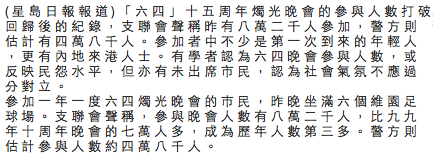
- In 2009, the Alliance claimed 200,000 but the Hong Kong police estimated
62,800. At the time, Alliance vice-chairman Choi Yiu-cheung said that the
police told them that the six soccer fields have a capacity of almost
100,000 persons. But since the lawns, basketball courts and plaza were also
filled, the Alliance therefore estimated 200,000.
- (International
Journalists' Network) July 24, 2013.
Herbert Jacobs, a University of California,
Berkeley, journalism professor in the 1960s, is credited with modernizing
crowd-counting. From his office window, Jacobs could see students gathered
on a plaza protesting the Vietnam War. The plaza was arranged in a grid,
so Jacobs counted students in a few squares to get an average of students
per square, then multiplied that by the total squares. He also came up
with a basic density rule that says a “light crowd” has one person per 10
square feet and a “dense crowd” has one person per 4.5 square feet. A
heavily crowded, “mosh-pit” density, as Watson and Yip call it, would have
one person per 2.5 square feet.
...
You may get different numbers from
police, private security and the organizers. A little math can help you
decide which estimate is closer to correct. For instance, after a June 4
candlelight vigil in Victoria Park in Hong Kong to mark the 22nd
anniversary of a crackdown on the pro-democracy movement in Beijing,
Reuters, BBC and other major news agencies used the organizer’s estimate
of 150,000. The police estimate was 77,000. Watson and Yip estimated the
average density to be slightly less than 2 people per square meter,
corresponding to a solid crowd. They knew the area of the space was around
42,000 square meters. An estimate of 150,000 would have required that the
entire area was covered with people at mosh pit density, which they knew
it was not. Based on these facts, they estimated the crowd to be closer to
the police estimate.
- The rule of thumb for an assembly in
Victoria Park is "one soccer field = 7,000". Here "assembly" means a
sit-down demonstration such as the June 4th candlelight vigil. People stay
there for several hours and therefore require a certain amount of
interpersonal space to sit and stretch. The density will be higher for the
July 1st march at the point where people file to get out of the park into
the streets. The density will be even higher for the Lunar New Year Fair
(see
YouTube) where people have to inch ahead because there is absolutely no room to
move in any direction.
- The entire area of Victoria Park is 19
hectares. If they flatten everything out (including the central lawn, the
trees, the flowerbeds, the water fountains, Queen Victoria's statue, the
restrooms, the skating rink, the swimming pool complex (with its 3,500
spectators seats), the bowling greens,
the band stand, the fitness station, the jogging trail, the pools and ponds,
the children play areas, the pavilions, the fast food kiosks, the tennis
courts and the audience grandstand, etc), they have a total of 190,000
square meters. If they allow one square meter (=10.7 square feet) per person
for this 'light crowd,' they can indeed have 190,000 persons. But if you
look at the map below, the soccer pitches and basketball courts are only
about one-quarter of the total park area. Therefore, if they filled up six
soccer pitches and the basketball courts, they should have about 50,000
people.
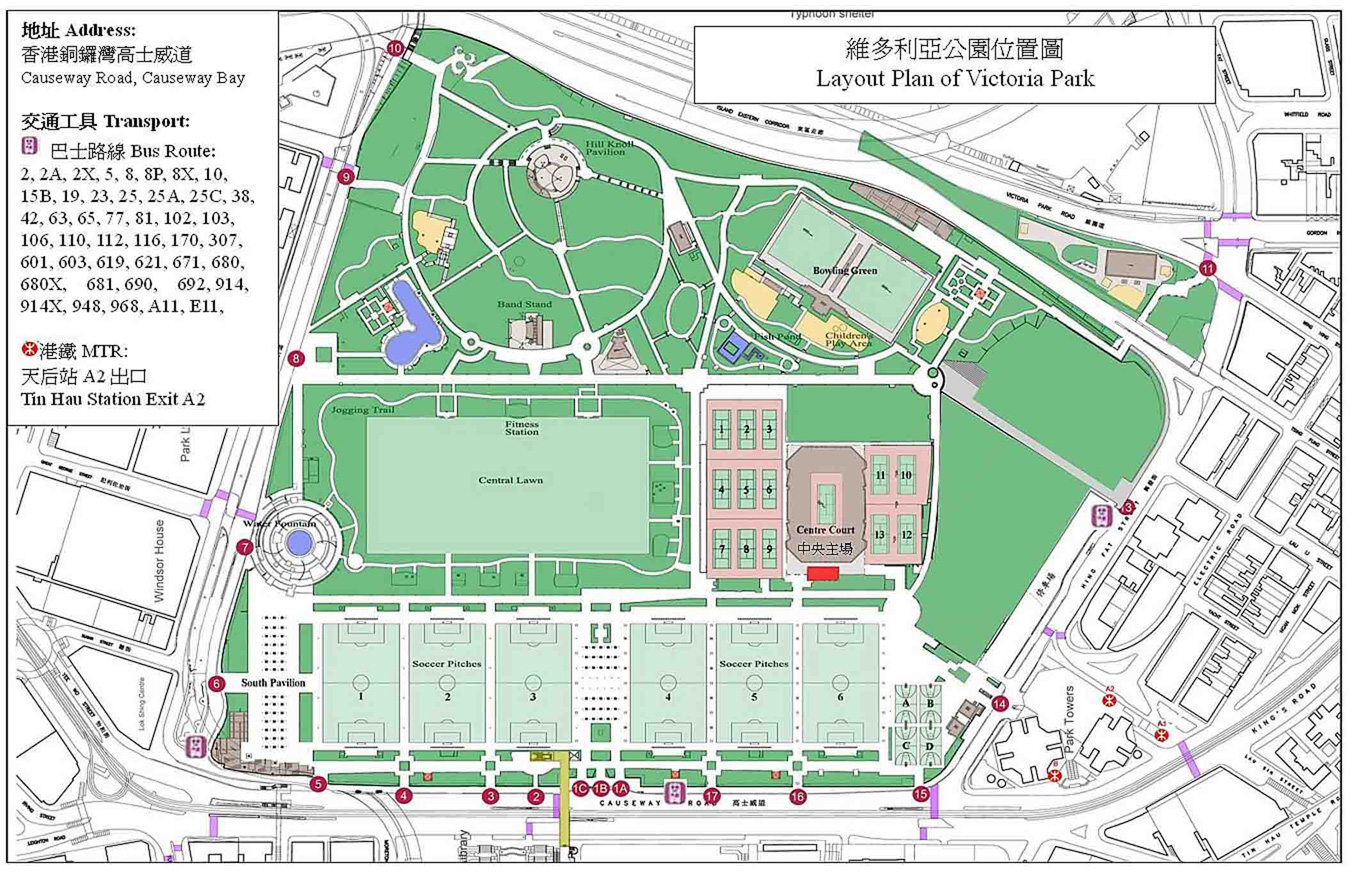
As usual, the Alliance to Support Patriotic Democratic Movements in China
and the Civil Human Rights Front (which have the same cast of characters
such as Albert Ho and Lee Cheuk-yan in charge) have produced a
scientifically impossible but politically necessary attendance figure.
- Here are the reverse calculations: Six
soccer fields for 135,000 persons. That means 22,500 persons per soccer
field. Each soccer field (designed for seven-person teams and not for the
full complement of 11 players per side) is 60m by 50m. That means 22,500 /
(60*50) = 7.5 persons per square meter. This means each person shall occupy
1/7.5 = 0.13 square meters = 14 inches by 14 inches. And they are sitting
down. Why don't you try sitting down on 14 inches by 14 inches space. Tee hee hee ....
-
Hong Kong Stadium has a seating capacity of 40,000. But the Alliance
can put 22,500 persons in one small soccer pitch.
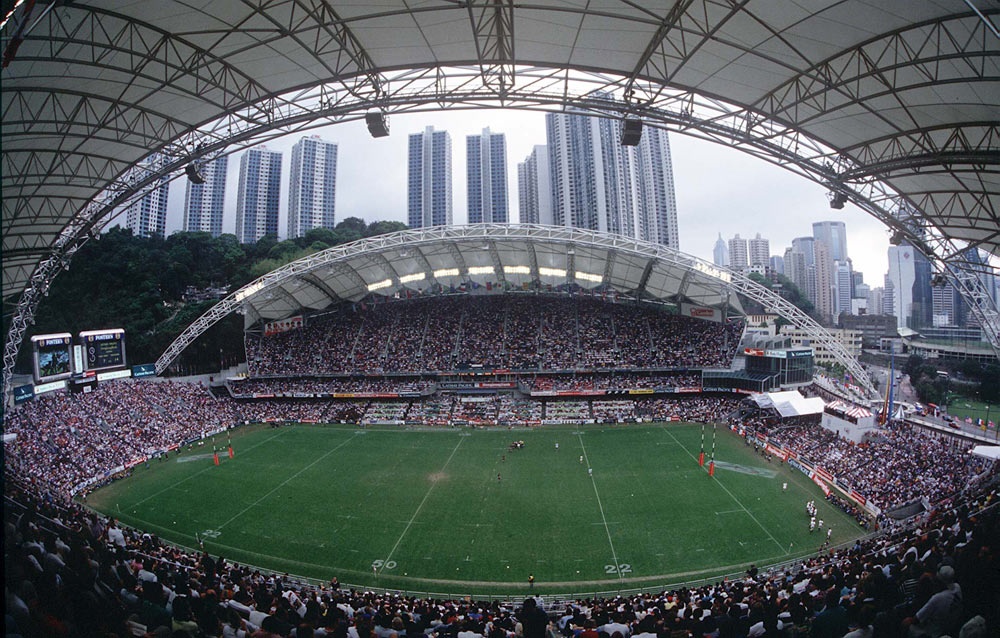
- Whose number do you trust?
On one hand, North Korea said 100,000 soldiers/civilians came out to
celebrate the third successfully concluded nuclear test on February 12,
2013. The crowd was neatly arrayed with very little interpersonal space.
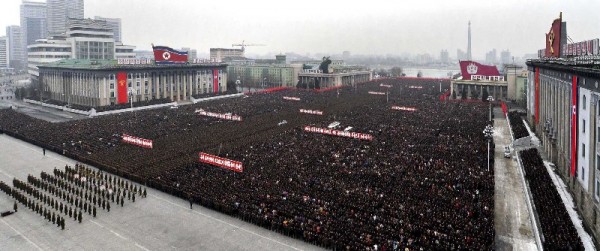
On the other hand, the Alliance to Support Patriotic Democratic Movements in
Hong Kong said 135,000 participated in the June 4th candlelight vigil in
2015. The crowd showed less organization and more interpersonal space.
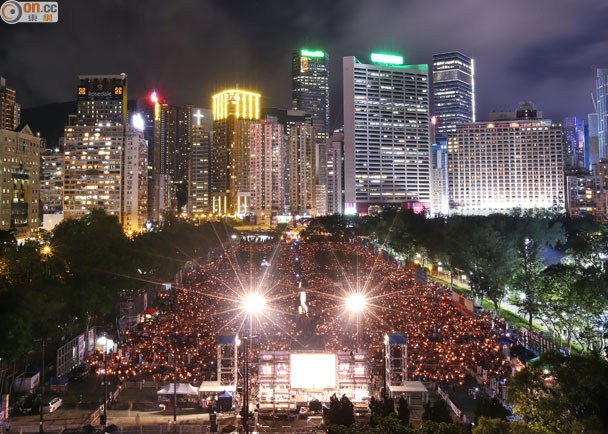
- (Oriental
Daily) According to Alliance vice-chairman Choi Yiu-ming, they
raised $1.3 million in donations this year, which is $400,000 less than last
year.
- Well, those participants are all fucking cheapskates! $1,300,000 from
135,000 persons is $9.63 per capita. The one-way subway fare from Mong Kok
to Causeway Bay is more than $10 already, and they want to give less than
$10 for several hours of music and entertainment plus one candle. Shame on
them!

Q1. Have you participated in any
of the previous June 4th candlelight vigils in Victoria Park organized by the
Alliance to Support Patriotic Democratic Movements in China? If yes, for how
many years?
50%: Never
32%: One or twice
12%: Three to four times
4%: Five to six times
2%: Seven or more times
Q2. Will you participate in this
year's June 4th candlelight vigil in Victoria Park organized by the Alliance to
Support Patriotic Democratic Movements in China?
29%: Yes
31%: No
40%: Undecided
Q3. Do you support the following
platform policies of the Alliance?
76%: Release arrested democracy activists in China
69%: Vindicate the June 4th democracy movement
58%: Account for responsibility for the massacre
53%: End one-party rule in China
60%: Construct a democratic China
Q4. Do you think the people of
Hong Kong have the responsibility to "construct a democratic China"?
53%: Yes
14%: No
33%: No opinion
Q5. Some people say that
"constructing a democratic China" is to remote and impractical for the people of
Hong Kong. Do you agree?
38%: Disagree
33%: Agree
29%: No opinon
Q6. What are your reasons for not
attending this year's June 4th evening assembly organized by the Alliance?
35%: Too stylized
28%: Attendance won't help vindicate June 4th
12%: The Alliance is guiding the June 4th issue
10%: Disagree with the Alliance's goal of "constructing a democratic China"
7%: The June 4th incident has nothing to do with me
6%: The evening assembly is too sad
1%: The central government did no wrong during the June 4th incident
30%: Other
(Hong
Kong University Public Opinion Programme) 1,089 Hong Kong residents were
interviewed by telephone on May 22-28, 2015.
| Date of survey |
16-18/5/2011 |
22-29/5/2012 |
23-25/5/2013 |
17-22/5/2014 |
22-28/5/2015 |
| Sample base |
1,007 |
1,003 |
1,013 |
1,005 |
1,089 |
| Finding for each question /
Sampling error |
Finding |
Finding |
Finding |
Finding |
Finding |
|
Proportion of respondents
believing: |
|
|
|
|
|
|
The Beijing students did the
right thing |
49% |
55% |
54% |
48% |
49% |
|
The Beijing students did the
wrong thing |
15% |
16% |
15% |
17% |
17% |
|
The Chinese Government did
the right thing |
11% |
12% |
10% |
12% |
14% |
|
The Chinese Government did
the wrong thing |
65% |
69% |
68% |
64% |
63% |
|
There should be a reversion
of the official stand on the incident |
58% |
61% |
63% |
56% |
52% |
|
There should not be a
reversion of the official stand on the incident |
19% |
17% |
16% |
20% |
24% |
|
China’s human right
condition has improved since 1989 |
55% |
62% |
51% |
56% |
61% |
|
China’s human right
condition has worsened since 1989 |
14% |
14% |
18% |
19% |
15% |
|
China’s human right
condition would improve after 3 years |
40% |
47% |
40% |
40% |
44% |
|
China’s human right
condition would worsen after 3 years |
12% |
14% |
16% |
19% |
16% |
|
HK people have a
responsibility to instigate the development of democracy in China |
67% |
70% |
68% |
65% |
66% |
|
HK people have no
responsibility to instigate the development of democracy in China |
21% |
19% |
20% |
21% |
24% |
|
HK people have a
responsibility to instigate economic development in China |
68% |
71% |
67% |
62% |
62% |
|
HK people have no
responsibility to instigate economic development in China |
23% |
21% |
24% |
26% |
28% |
|
HK people should put more
effort on instigating economic than democratic development in China |
34% |
29%[8] |
25% |
31% |
29% |
|
HK people should put more
effort on instigating democratic than economic development in China |
33% |
35% |
42% |
37% |
37% |
|
China should emphasize more
on economic development |
32% |
29% |
25% |
28% |
28% |
|
China should emphasize more
on democratic development |
43% |
42% |
48% |
45% |
41% |
| Date of survey |
23-31/5/2011 |
22-29/5/2012 |
23-25/5/2013 |
17-22/5/2014 |
22-28/5/2015 |
| Finding for each
question |
Finding |
Finding |
Finding |
Finding |
Finding |
|
Popularity rating of the HK
Alliance in Support of Patriotic Democratic Movement in China (“the
Alliance”) (0-100) |
51.7 |
54.5 |
52.8 |
50.1 |
44.6 |
|
The Alliance should be
disbanded |
-- |
15% |
16% |
18% |
26% |
|
The Alliance should not be
disbanded |
-- |
56% |
48% |
44% |
38% |
Internet comments:
- It is a fund-raising event for
the pan-democrats. Why should I go? (see (SCMP)
Hypocrisy is unacceptable, whether outside or within the democratic camp. By
Michael Chugani. May 29, 2015.)
- June 4th is a commercial event invented by business people, just like
Valentine's Day, Mother's Day, Father's Day, etc. On this day, they want people
to spend money to buy the products of these business people.
- Did Ming Pao commission this
survey on their own initiative? Or did the Alliance to Support Patriotic
Democratic Movements in China paid them to run unannounced advertisement?
- This advertisement used to run every year in Apple Daily. Given the rapid
decline in Apple Daily's circulation, the advertiser has moved it over to Ming
Pao.
- On Q4: "Do you think the people
of Hong Kong have the responsibility to "construct a democratic China"?" the
breakdown by university is:
67%: Lingnan University
63%: Polytechnic University
61%: Chinese University of Hong Kong
60%: Shu Yan University
58%: City University
54%: University of Science and Technology
42%: Baptist University
17%: Hong Kong University
Who did they interview at Hong Kong University? Communist Youth League members
from the mainland? Or the City-State Valiant Warriors?
- Hong Kong as a model for
mainland in commemorating June 4th? So every June 4th, some people show up and
sing karaoke. Then they disband feeling good about themselves and come back the
same time next year to repeat the same. (Oh, don't forget to make your
donations!)
- Once upon a time, it was said
that the democratic spirit of the people of Hong Kong was an inspiration for the
people of China. Then came 79 days of Occupy Central, followed by the Shopping
Revolution and the Anti-Parallel Trader Demonstrations. If this is the model of
democracy, then the people of China don't want it. The Chinese Communists have
the Hong Kong pan-democrats to thank.
- Mainlanders have seen the Red Guards before. They'll be damned if they want to
imitate Hong Kong's Yellow Guard students.
- The people of Hong Kong want to teach mainlanders how to sleep in the streets
to block traffic in order to achieve democracy. What a strange idea!?
- If you want to the mainlanders
to rise up, they must be pretty dissatisfied with the existing system. Here is
the Pew Research Center study international satisfaction/dissatisfaction with
their country's direction:
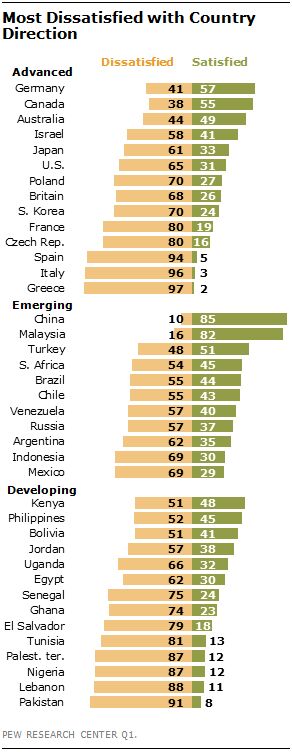
- Interview with June 4th student
leader Chai Ling:
Chai: It is not worthwhile for me
to sacrifice for you. Actually we were hoping for bloodshed. I was thinking
about when blood would flow like a river on the square. But how can I tell this
to the fellow students? We want bloodshed here. We want to use the blood and
lives to arouse the people.
Reporter: Will you continue to remain at the square?
Chai: I don't think so.
Reporter: Why?
Chai: Because I am not like everybody else. I am on the blacklist. I am being
cruelly persecuted by this government. I won't accept it. I want to live.
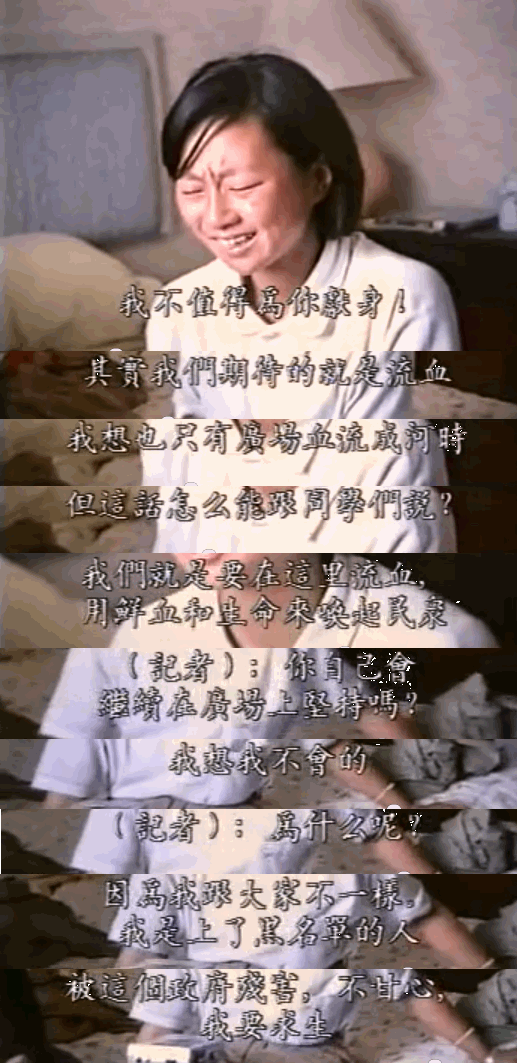
Comparisons:
(YouTube
via SpeakOut.hk) Excerpt from Cable TV's report
0:12 (VO) After the clearance of the
Occupy Mong Kok area, the students decided to escalate the action. There had
been a huge change in public sentiments compared to the initial days of the
Occupy Movement. It turns out that they did this to show that radicalism may not
be useful.
0:25 (Alex Chow) There was definitely
the wish to show those people who wanted mainly to escalate that such actions
are not ideal. This shows that the movement needs to be more diversified. You
cannot only count on escalation as the main thing.
- Front pages of newspapers in June
1989:
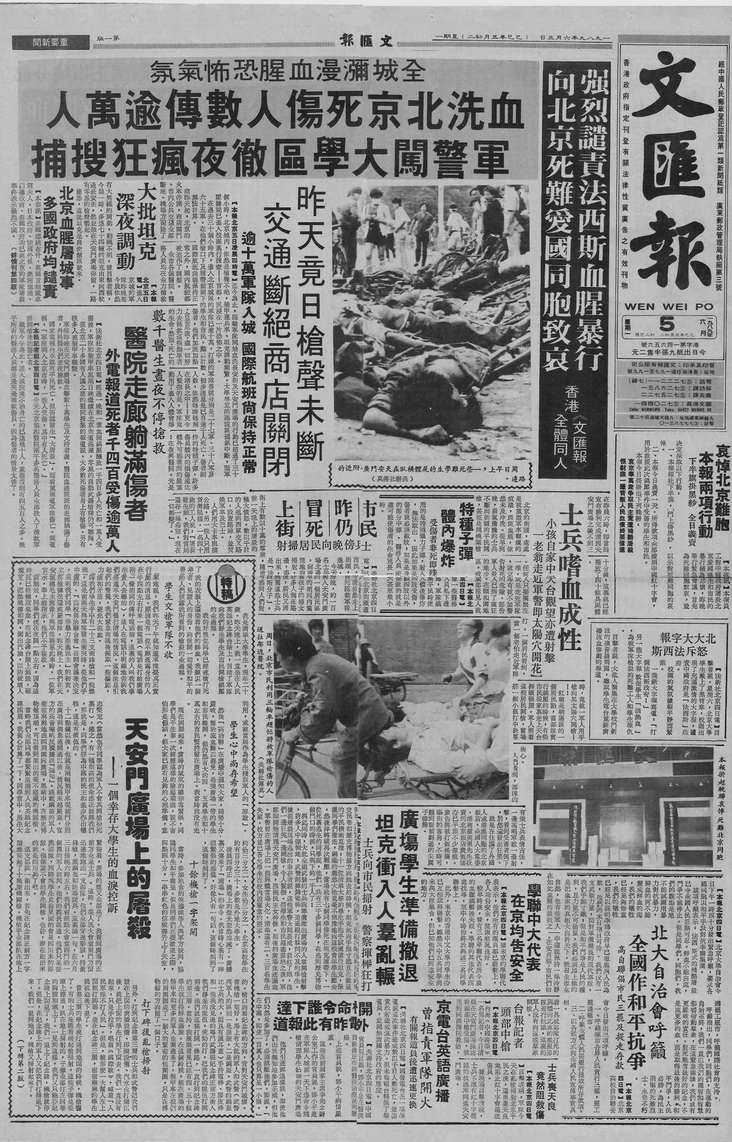
Wen Wei Po ... more than 10,000 dead in Beijing
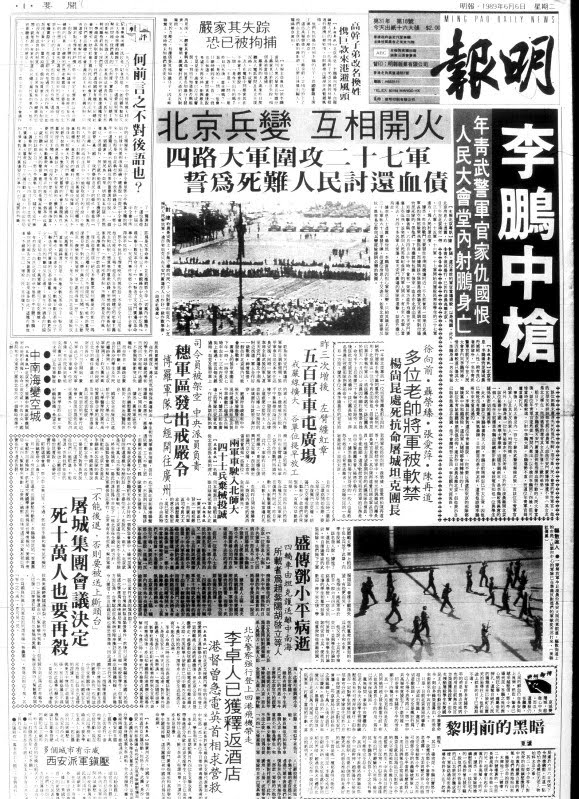
Ming Pao ... young armed police officer shot Li Peng dead inside
Great People's Hall to take revenge for family and nation
Military coup in Beijing ... Four armies attacked Number 27 Army to seek revenge
for the dead civilians
(Civic
Passion) May 30, 2015.
We never think that nothing
happened on June 4th 1989, and we never forget the Chinese students who were
slaughtered by the People's Liberation Army. Over the years, certain Hongkongers
who support democracy (especially those Yellow Ribbons who went through the
Umbrella Revolution) still think that they should go to the candlelight vigil in
Victoria Park held by the Alliance in Support of Patriotic Democratic Movements
in China on the evening of June 5th. They continued to light white candles and
sing songs to commemorate the souls of June 4th, and they demanded the Chinese
Communists to vindicate June 4th, to end one-party rule and to build a
democratic China ...
But under the current
circumstances, I think June 4th is seriously disconnected from Hong Kong. The
Chinese Communists want to control Hong Kong further through politics,
economics, culture and even population structure and exercise total colonial
rule. The Alliance refuse to acknowledge this reality, and keep shouting vacuous
slogans such as "End one-party rule, build a democratic China". They are stuck
in the pre-1997 "democratic return" theory as well as "Hong Kong can't have
democracy unless there is democracy in China." They hope that one-party rule
will end someday in China, the reformists will assume power, vindicate June 4th
and hold democratic elections in China. At the same time, they also feel that
Hong Kong is part of China and therefore it is natural for the Hongkongers to
want democracy in China. They refuse to acknowledge that the Hong Kong people
are leaning towards localism. The Alliance will never understand this simple
truth: When the people in a place want to self-determination and democracy, they
will have to fight for it themselves. If the Chinese people don't want to fight
it themselves, then that's their problem. There is no reason to bundle the
destiny of the Hong Kong people with the destiny of the Chinese people. So it is
no wonder that the Alliance is completely alienated from the Hong Kong people
(especially the youth).
After the June 4th 1989 incident,
the Chinese Communist never mentioned political reform again (except maybe
administrative reform). When Xi Jinping became the Secretary-General of the
Communist Party and the President, the system became even more consolidated.
There is practically no hope for democracy to arrive in China. It is even more
ridiculous to expect the totalitarian regime to concede democracy and
vindication of June 4th. Besides the Hongkongers are beginning to realize that
even as their Chief Executive election is being to distort the Basic Law, our
freedom to watch television is being deprived because we can only watch TVB.
The Alliance still wants to use
"Chinese democracy" as a slogan to fight till the end. They want to use
"patriotism" to poison the people of Hong Kong. They want to place their hopes
on a vacuous "Chinese democracy." They are only trying to maintain stability for
the Chinese Communists. They say that "China will change, China will have
democracy" to stop worrying about democracy in Hong Kong. Therefore, the June
4th evening assembly is a never-ending political show, a roadblock to Hong Kong
Localism. First of all, you cannot completely overthrow the Chinese Communists.
Secondly, you won't give any priority to Hong Kong Localism. Instead, you want
to save those completely amoral "Chinese compatriots" who only see money in
their eyes. You are standing on the opposite of the people of Hong Kong.
The pamphlet produced by the Alliance showed that they are not only
disconntected from the word, but they also refuse to acknowledge the wave of
Hong Kong Localism or the will for Hongkongers to pursue freedom for themselves.
The Alliance has now accumulated
more than $10 million in capital now. Without the June 4th candlelight vigil,
the Alliance will lose the sizeable donations that roll in every year. The
Alliance standing committee members will lose their aura as "democracy agents"
and speech rights on the subject of June 4th. They will also lose the trust of
the people of Hong Kong. So every year they hold this June 4th evening vigil to
show that they will keep fighting the fight. They use the dead souls of June 4th
to exploit the moral guilt of the people of Hong Kong, who end up donating money
or buy their products in order to support the Patriotic Democratic Movements in
China. Nothing else that the Alliance generates as much cash and exposure as the
June 4th evening vigil.
All this shows is that these
Alliance people are not patriotic enough towards China, and definitely disloyal
to Hong Kong! The Alliance was able to hold the annual June 4th gatherings only
because the people of Hong Kong are indifferent to politics. Otherwise Lee
Cheuk-yan, Albert Ho and other Alliance standing committee members would have
been swept out already. The Alliance exploited the June 4th dead souls in order
to accumulate cash and political capital (for the Alliance itself, plus the
Professional Teachers Union and the Democratic Party). After this June 4th
assembly, they will plan for the upcoming District Council and Legislative
Council elections so that the politically indifferent Hong Kong people will
continue to vote for the pan-democrats. Such behavior is utterly shameless!
I want you to understand that we
are not saying that Hong Kong cannot commemorate June 4th. But we would not
support the deceptive June 4th candlelight vigil held by the Alliance and their
so-called "Patriotic Democratic Movements." If we can do something, it will be
to completely boycott the Alliance and their June 4th evening vigil in Victoria
Park! The meaning of June 4th for Hong Kong should undergo a fundamental
transformation into Localism!
(Oriental
Daily) May 31, 2015.
The Alliance to Support Patriotic
Democratic Movements in China marchers set off from Southorn Playground at 3pm
and arrived more than two hours later at the China Liaison Office. The
organizers announced that there were 3,000 marchers this year.
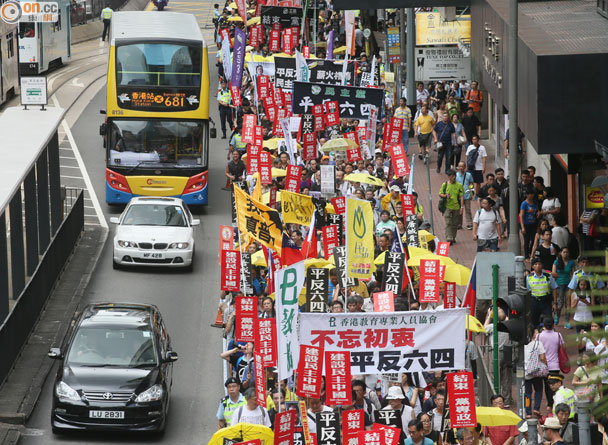
(Oriental
Daily) May 31, 2015.
Before the Alliance's march began,
about 20 or so Localism Power members heckled the marchers for betraying the
people of Hong Kong. They shouted and made obscene gestures.
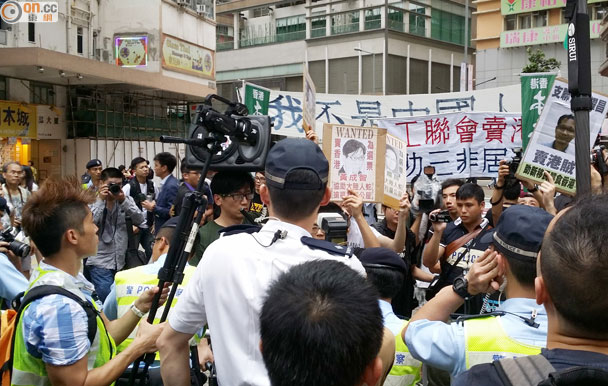
Localism Power using banners such as "I am not
Chinese."
(The
Standard) June 1, 2015.
Localism supporters
attempted to disrupt the June 4 rally from Wan Chai to the central
government liaison office in Western district yesterday by hurling abuse and
chanting slogans at marchers.Organizer the Hong Kong Alliance in Support of
Patriotic Democratic Movements of China said 3,000 people took part in the
two- hour pro-democracy march, which commemorated the Tiananmen Square
crackdown in 1989. The police estimate was 920 people at its peak.
Some participants said there were fewer
young people. One elderly marcher said he has been joining the rally for the
past 20 years and that, for this year, the number of youngsters has
decreased. Others said they were disappointed the Federation of Students did
not participate. But alliance vice chairman Richard Tsoi Yiu-cheong said the
demographics remained mixed. He added: "I heard reports [of fewer young
people]. The main point is not the march itself, but the vigil. It is more
symbolic," he said.
The slogan for this year's march was "Stay
united to fight for democracy, fighting to vindicate June 4." Marchers also
called for the release of dissidents and to "build a democratic China." The
emphasis on a nationalistic view led to a rift with about 20 people from
Hong Kong Localism Power, who believe that there should be a more Hong
Kong-oriented approach.
The localists engaged in verbal arguments
with rally participants at Southorn Playground in Wan Chai at the beginning
of the march. Police were forced to separate the two sides with metal
barricades. There were also verbal spats along the route, with insults such
as "people walking should die quicker" being hurled at marchers.
In another incident near Pacific Place in
Admiralty, a water bottle was thrown from a passing tram into the marching
crowd. Participant Brian Kern said: "I have been coming for many, many
years, and it is obviously just something you have to persevere with. The
people in 1989, they fought so hard for so much. China has changed so much
in the last 26 years, economically socially and culturally, but politically
it's stuck in time. We want to change that."
Participants wore yellow ribbons and some
carried yellow umbrellas in tribute of last year's Umbrella movement.
The rally was led by former alliance
chairman and Labour Party leader Lee Cheuk-yan and current head and
Democratic Party lawmaker Albert Ho Chun-yan. "We have persevered for 26
years, and we are not weary. We have to be ever stronger, heartened and
determined," Ho said.
The march comes ahead of the annual June 4
vigil at Victoria Park. The University of Hong Kong student union said it
will not take part, as it did not agree with "building a democratic China."
Student unions from other universities said they will attend.
(The
National) Protest movements split in the new Hong Kong. By Jamie Kenny.
May 26, 2015.
Faced with a wall
of official intransigence, the young activists of the so-called Umbrella
movement in Hong Kong were eventually forced to leave the sites they had
occupied last autumn without gaining any of the concessions they demanded
from the Hong Kong government and Beijing.
But when the umbrellas folded, the shopping
revolutionaries moved in. And while the original protesters limited their
demands to universal suffrage within the One Country-Two Systems framework,
a new generation of radicals are aiming for something different: full
autonomy, or independence for Hong Kong.
Nativism, as expressed through a variety of
small “bentupai” or local faction groups, has been a visible presence on
Hong Kong’s political fringe since the 2011 publication of Horace Chin
Wan-Kan’s On the Hong Kong City State.
Dr Chin, a local folklorist and former
civil servant, argues that Hong Kong represents a traditional and superior
manifestation of Chinese culture, one that was preserved under British rule,
while being destroyed in China under communism. Without independence, the
argument goes, Hong Kong now risks being overcome by a tide of “mainlandisation”.
Since the book’s publication, Hong Kong
autonomists have played a small but highly visible role in public protest,
often while waving colonial era Hong Kong flags. This is to the discomfort
of more traditionally minded democratic activists, many of whom still
identify as Chinese patriots. Autonomists have also staged small but growing
counter-demonstrations before the annual June 4 commemoration vigil, the
traditional red letter day of the wider Hong Kong pan-democratic movement.
Autonomists also made their presence felt
in last autumn’s occupation, led by the Civic Passion and Hong Kong
Indigenous groups and displaying what looked like classic entryist tactics:
jumping on a bandwagon started by others and then trying to steer it in
their preferred direction.
They succeeded, to an extent, by becoming
the last protesters standing. Most activists retreated when the police
finally broke up the camps.
The nativists kept on going, staging a
series of “shopping revolution” protests in which businesses popular with
mainland tourists were aggressively picketed. These later morphed into a
campaign against so called parallel trading, in which groups of vigilantes
stalked areas popular with mainland visitors, looking for small-scale
smugglers.
This led to some ugly scenes, since the
activists were often none-too fussy about who they decided was a smuggler.
Hong Kong’s pro-Beijing press have been quick to leap on images of old men
being shoved over in the street because they were carrying too many shopping
bags and young women with children subjected to sustained verbal abuse.
Something had changed – and not for the
better. Last September, Hong Kong was widely seen as a city in which the
people were rising up for their rights. This year, Hong Kong seems to be the
only place on Earth where it is acceptable in some political quarters for
Chinese people to be physically harassed on the basis of their nationality.
Ugly as the strategy might be, it appears
to be getting results among the activist base previously aligned with Hong
Kong’s wider pan-democratic movement. The citywide Hong Kong Federation of
Students, which effectively led the Occupy movement, has been hit by a wave
of disaffiliation motions from its constituent universities. And the student
body itself has withdrawn from the official June 4 commemoration, apparently
under pressure from students who want a more local focus for protest.
It’s not that the wider activist community
share the cultural chauvinism of the bentupai groups. Many see a Hong Kong
identity as part of a cosmopolitan commitment to universal human rights.
Perhaps most think that their democratic ideals are simply unrealisable
within the one country-two systems framework.
Videos:
(dbc)
https://www.youtube.com/watch?v=ojFLBEagN4E Speeches by organizers.
Localist hecklers at 2:45.
(INT News Channel)
https://www.youtube.com/watch?v=0tp9Q66zFZ0 1:47 Pro-China
counter-demonstrators. 1:55 Localist counter-demonstrators shouting that "Hongkongers
and Chinese are two separate races."
Internet comments:
- (Commercial
Radio) Alliance to Support Patriotic Democratic Movements in China
chairman Albert Ho announced that 3,000 persons marched today, about the same as
last year. The Hong Kong police said that the peak number was 920, which is less
than the 1,900 last year.
- A lot more people attended the Sha Tin horsing racing meet today.
- Nobody cares about attendance figures. The key figure is the dollar amount of
the donations. Normally, fewer attendees mean fewer dollars.
- The core values of the June 4th
movement in Hong Kong are (1) raise money; (2) raise more money ...
- The money pot is very attractive, so this year there are four rivals events
on the evening of June 4th to divvy up the spoils. In 2015, the Heritage
Foundation continued to rank Hong Kong as the world's freest economy.
- Only idiots will attend -- your
money is ripped off and you have to sweat all the way as a human stage prop for
the big shots.
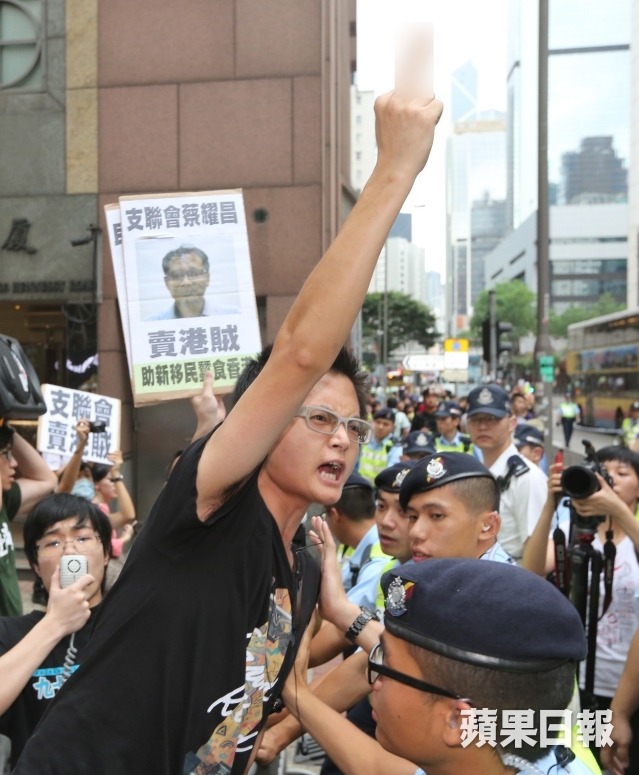
- Freedom of expression being violated because
Apple Daily applied a mosaic to the guy's middle finger as if you won't be able
to guess.
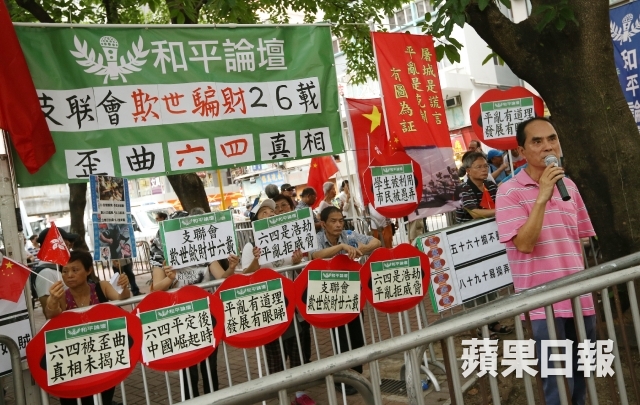
- These counter-demonstrators have a point: "The
Alliance to Support Patriotic Democratic Movements in China has been deceiving
the world and swindling money for 26 years." If someone wants you to keep
investing money for 25 years without having a single accomplishment to show,
would you continue to give money to them?
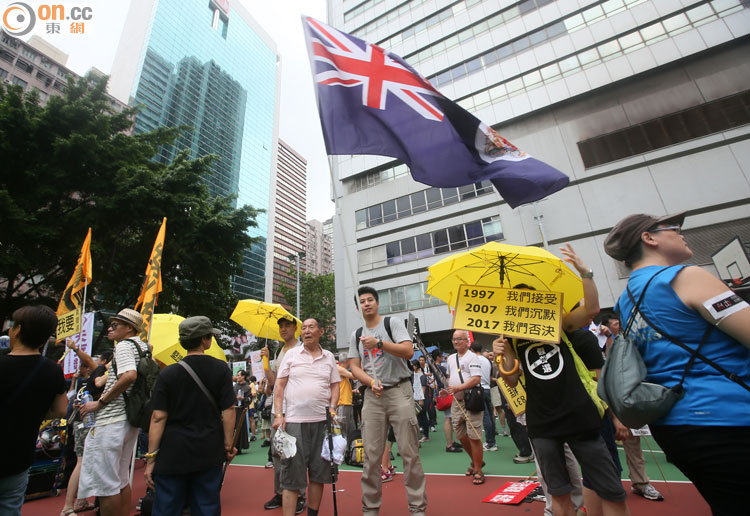
- Captain America
shows up with the British Dragon/Lion flag for Hong Kong independence. But his
is definitely not a "Patriotic Democratic Movement in China" and therefore the
Alliance won't support him.
- First, they say that they are not Chinese. Then they showed up to attend a
Chinese patriotic event. Schizophrenic personality at work?
(Oriental
Daily) May 30, 2015.
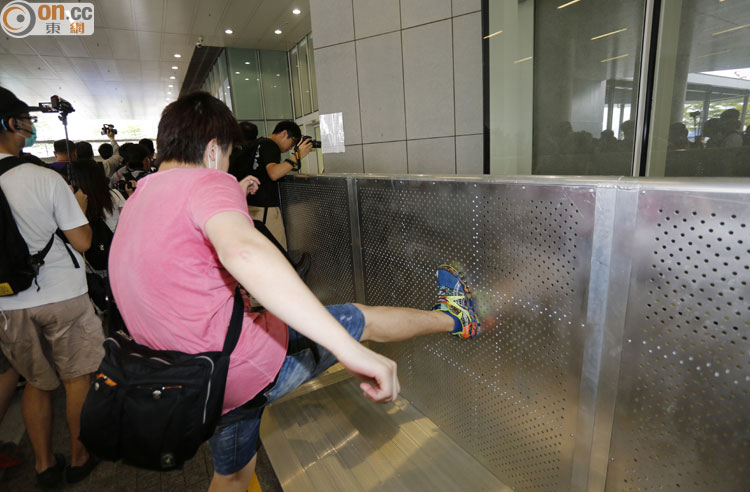
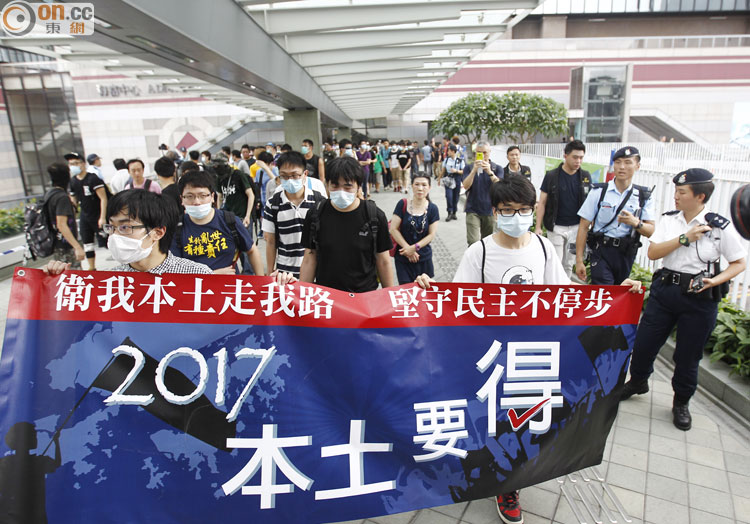
The Localists started the "2017
Localists Must Win" demonstration march today to oppose the government's
proposal for the 2017 Chief Executive election.
The demonstrators assembled at
Chater Garden in Central. They marched to the Hong Kong Police Headquarters. At
around 445pm, they arrived at Admiralty Centre and went along Tamar Park to the
Legislative Council demonstration area. At first, they wanted to wait at the
Admiralty Centre pedestrian overpass to wait for others to arrive. But the
police told them that they cannot on the overpass itself. So they began cursing
out the police and chanting "I want to build the Hong Kong nation" and "The
City-State shall win and return."
When they arrived at the
Legislative Council, they split up. Some of them began to remove the screws in
the gate and then kicked the gates. The police reinforcement arrived. Some of
the demonstrators charged into the parking garage. They said that they will
return tomorrow when they plan to intercept the June 4th march.
The police said that they received
a call at 5pm from the Legislative Council secretariat that certain individuals
had destroyed the new iron barricades placed outside the demonstration area. The
police treated the case as criminal destruction of property.
Videos:
(SocREC)
https://www.youtube.com/watch?v=yP0rSIJjPZM People walking around the
streets.
(SoeREC)
https://www.youtube.com/watch?v=8csNAdQ4O6M Masked demonstrators
destroying the iron barricades with many so-called photojournalists in company.
(dbc)
https://www.youtube.com/watch?v=EvNuMbVu_cU A lot of shouting and
yelling.
Internet comments:
- A lot of yelling and shouting
went on. It turned out that the whole thing involved about 100 demonstrators,
many of whom wore surgical masks to cover their faces.
- The Hong Kong Golden Forum boys predicted that 100,000 demonstrators would
show up. They were off by three orders of magnitude (10x10x10 = 1000).
- In Chinese, the word 示威
for "demonstration" literally means "a display of strength." Today, these 100
put on "a display of weakness."
- They chant "I want to build the
Hong Kong nation" and they wave the British colonial Dragon/Lion flag. Their
path to Hong Kong independence consists of (1) China shall hand Hong Kong back
to the Great Britain because China has failed to honor the Joint Sino-British
Declaration; (2) then Great Britain shall grant independence to Hong Kong in the
same way that it has granted independence to Singapore, Canada, Australia, New
Zealand, Zimbabwe, etc. Nobody else in the world sees as this being remotely
plausible.
- When Step (1) is achieved, we will get the Queen's birthday as an additional
public holiday. When Great Britain handed Hong Kong back to China in 1997, the Queen's
birthday was replaced by Buddha's birthday. We can't very well eliminate
Buddha's birthday as public holiday, because that will hurt the Buddhists'
feelings. So we'll have an extra holiday! Long live the Queen!
- When Step (1) is achieved, all movie houses in Hong Kong are going to play
God Save
The Queen before every showing, and all television channels will play
the anthem video before all news broadcasts.
- I miss the Hong Kong Priority demonstrators, because they sang God Save The
Queen as well as the Japanese anthem
Empire
of Japan, because Japan was the other colonial master of Hong Kong (for
3 years 8 months during 1941-1945). Of course, it was never certain that the
Hong Kong Priority folks were being stupid or ironic.
- They chant "The Hong Kong
City-State shall win and return." How does 100 masked young men hope to win
against the 2-million-strong People's Liberation Army? This is not Game of
Thrones.
- They demonstrate today because
they are worried that the pan-democrats may be holding backroom talks with the
central government to see a compromise solution. So what if that is true? How is
a demonstration by 100 masked young men going to change any of it?
- Question: Why do they cover
their mouths? Answer: They don't have any teeth and they are ashamed.
- The organizers were long gone
before the police showed up. The undeclared genuine slogan for this
demonstration march: "(我們)不被捕,(我們)不受傷,其他參與市民呀,話知佢地死都唔關我主辦者事。".
["We will not be arrested. We will not be injured. As for the other
participants, we the organizers don't care if they live or die."] Buyers beware!
- Summary for the day:
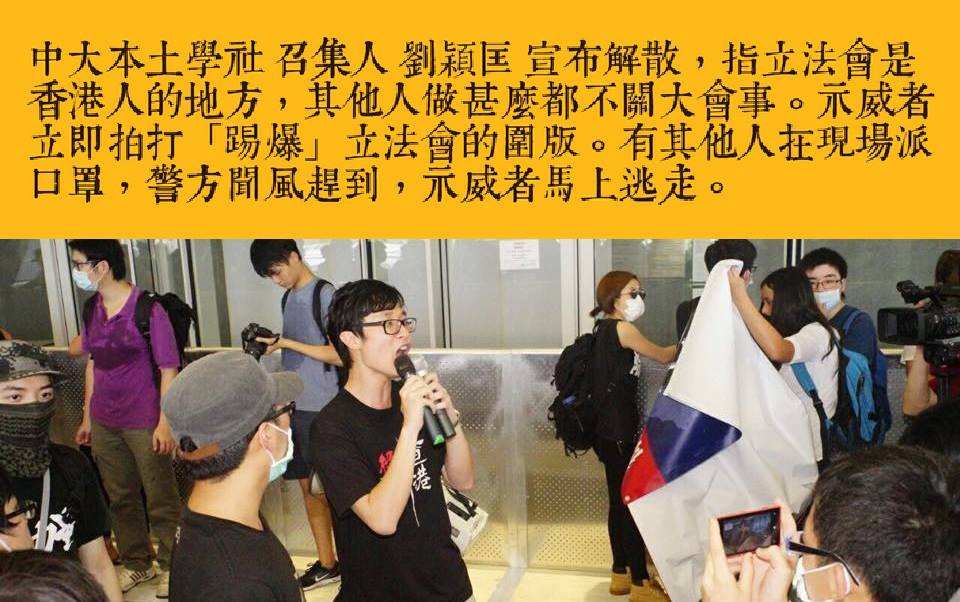
Chinese University of Hong Kong Localism Study Group convenor Lau Wing-hong
announced that the demonstration is dissolved. However, since the Legislative
Council belongs to the people of Hong Kong, whatever other people do has nothing
to do with the organizers. The demonstrators then immediately pounded on the
fences surrounding the Legislative Council building. Meanwhile, they distributed
surgical masks to all those present. When the police were informed and came to
the scene, the demonstrators immediately fled.
- About ten persons stood around
the banner that said: "I am not Chinese." If they are not Chinese, then what are
they?

Let's check the Hong Kong Census (see
Wikipedia):
Population of Hong Kong according
to ethnic group
Ethnic
group |
2011 Census |
| Number |
% |
| Chinese |
6,320,393 |
92.6 |
| Filipino |
133,018 |
1.9 |
| Indonesian |
133,377 |
1.9 |
| White |
55,236 |
0.8 |
| Others |
30,336 |
0.4 |
| Indian |
28,616 |
0.4 |
| Thai |
11,213 |
0.2 |
| Japanese |
12,580 |
0.2 |
| Other Asian |
12,247 |
0.2 |
| Nepalese |
16,518 |
0.2 |
| Pakistani |
18,042 |
0.3 |
| Total |
7,071,576 |
They are not Chinese? Then what
can they be? They don't look Filipino, Indonesian, white, Indian, Thai, Nepalese
or Pakistani. "Others" usually refer to Africans, Middle-easterners,
Micronesians, etc. The only choice left is "Other Asians," together with
Koreans, Singaporeans, Malaysians, Cambodians, Vietnamese, Laotian, Sri Lankans,
etc. But what passports do they hold? BNO? But that is just a travel
document and not a passport. HKSAR? But that is part of the People's Republic of
China.
(SCMP)
Is the rise of localism a threat to Hong Kong's cosmopolitan values? June
2, 2015.
Hong Kong may be gripped
by the
issue of political reform but the fate of a 12-year-old undocumented boy
from
the mainland is also the talk of the town. At the core, both are linked
inextricably to Hong Kong's identity vis-à-vis the mainland. The case of
Siu Yau-wai, smuggled here from Shenzhen by his grandmother at age
three, has
sparked a divisive public debate. Shortly after his case came to light
on May
21, the Immigration Department granted him temporary papers. But
anti-mainland
groups surrounded the office of Federation of Trade Union lawmaker Chan
Yuen-han
to protest against her role in helping the boy. They accused the veteran
unionist and Beijing loyalist of betraying Hongkongers by setting a
precedent
and opening the floodgates to illegal immigrants from mainland.
The protesters then went a step
further and besieged the Confucian Tai Shing Primary School in Wong Tai Sin,
whose principal had earlier voiced interest in offering the boy a place
after finding out he had never gone to school. Posters with the words
"traitors" and "my classmate is an illegal immigrant" were plastered on the
school's doors. Images of a schoolgirl bursting into tears because of the
incident sparked condemnation among many who felt the boy was being treated
with such derision because he was a mainlander.
Online, views have been equally
split. While some expressed reservations about the protests and called for
all children to be given access to education, others posted hateful comments
online, demanding the boy be deported to avoid setting a precedent for
illegal immigrants. They wanted him back on the mainland even though he has
no relatives there.
"Yau-wai is an illegal immigrant and
he should be sent back to the mainland immediately. China has its own social
protection system and there's no need for Hong Kong to take care of him with
its generosity," says Danny Chan Tsz-chun, a member of Hong Kong Blue
Righteous Revolt, a pro-independence group. "It's not a matter of sympathy,
but whether we can take care of ourselves. If I had a bowl of rice, I would
definitely share half of it with Yau-wai. But how could I do so if I had
only half a bowl of it?" Chan says Hongkongers have had enough and no longer
want to share their resources with outsiders.
Groups like Righteous Revolt are
becoming a small but vocal minority causing a headache even for
pan-democrats. The roots of such movements, dubbed "localism", are not
political. The first wave emerged in 2006 when activists set up groups such
as Local Action to campaign to save the Star Ferry Pier and Queen's Pier
from demolition in a bid to preserve the city's heritage and identity. But
localism has taken on an edgy political dimension over the past few years,
says Dr Law Wing-sang, a cultural studies scholar at Lingnan University.
And this is where the case of the
undocumented mainland boy intersects with politics.
Law cites two trends: the growing
tendency of Hongkongers to distinguish themselves from mainlanders and the
mounting calls for independence, which intensified in the wake of the 79-day
Occupy pro-democracy sit-ins last year.
Indeed, such sentiments fuelled a
series of radicalised and escalated protests in February and March, when
protesters overran shopping malls in Tuen Mun, Yuen Long and Sha Tin to vent
anger towards mainland tourists and cross-border traders for affecting their
daily lives.
Increasingly, the appeal of localism
has fanned out onto school and university campuses. The Federation of
Students - the city's oldest and most politically influential student group
which co-led the Occupy movement - has for the first time this year decided
to avoid the June 4 candlelight vigil that marks the Tiananmen Square
crackdown 26 years ago. Their reason is the slogan: "Build a democratic
China".
The chant - inoffensive since 1989 -
has touched on the nerves of Baptist University's student union, a former
member of the federation. "Building a democratic China should not be the
responsibility of Hongkongers," says Sunny Cheung Kwan-yang, external
vice-chairman of the union. "We Hongkongers have only one responsibility: to
protect Hong Kong."
Law says localism stems from
Hongkongers' strong love of the city they call home - as reflected during
the Occupy protests. But it is their "sense of crisis" because of the
political impasse that offers the oxygen for radical - or right-wing -
beliefs to thrive. "Such relatively right-wing localism emerges because some
Hongkongers think that many things in their city have been challenged," he
says. "Thus xenophobia becomes one of the options."
The challenges here refer not only to
the city's freedoms and rights, but also the resources - be it baby formula
or school places - which Hongkongers have accused mainlanders of snapping
up. But Law, who specialises in Hong Kong cultural formation and
citizenship, fears the city may pay a huge price for letting the right take
the lead in the localism movement. By setting themselves as being
deliberately against all mainlanders, they damage the core values of a city
long known for being cosmopolitan, Law laments.
He says the tactics adopted by
right-wing activists make them sound similar to the very forces they despise
on the mainland, with their nationalistic and populist overtones. "Many
Hongkongers dislike the political culture of the mainland … but then you
copy that to attack your 'enemies'," he says. "What's the difference between
Hong Kong and the mainland then? You're both unreasonable." But more
politicians may be betting on localism as a potential vote-winner. Back in
2012, the Civic Party's Claudia Mo Man-ching and NeoDemocrat Gary Fan Kwok-wai
were the only candidates who ran for Legco under the flag of localism.
Mo adopted a controversial "anti-mainlandisation"
slogan in the West Kowloon constituency, home to many mainland immigrants,
to emphasise the need to preserve the city's core values. Fan said
Hongkongers should come first in allocating resources. The duo - who formed
the group Hong Kong First after they entered the legislature - did not win
much applause from their pan-democratic allies back then.
Labour Party lawmaker Dr Fernando
Cheung Chiu-hung in 2013 refused to sign a petition initiated by the pair
and activists to express their discontent at the flood of mainland tourists
and immigrants, which they said had disrupted order in the city and put
heavy pressure on housing. Cheung said the activists should not put all the
blame on new immigrants but should focus on the city's unfair policies. But
today, ironically, the two key parties in the camp - Democratic Party and
Civic Party - are mulling over a plan to incorporate some elements of
localism into their declarations, albeit in a very careful way. It would be
an especially significant move for the Democratic Party, the city's oldest
pan-democratic grouping, as many of its members joined the movement in the
wake of the Tiananmen Square crackdown.
The Democrats have long advocated the
belief that the city and mainland China are closely related and that people
have a responsibility to care about the country and assist in its
democratisation. This position stands in stark contrast with the localism of
the youth of today. But it is time for a change, says Democrats'
vice-chairman Lo Kin-hei, one of the young advocates who want the party to
place more emphasis on Hongkongers' interests. Though Lo does not envision
cutting off the city's connection with the mainland, he wants the party to
push harder on policies that protect Hongkongers' core values and interests.
"As a party rooted in Hong Kong, we should make relevant reform amid the
change in social atmosphere," he says. "The thing Hongkongers care about the
most is their daily lives - which they now think are being affected by the
likes of mainland tourists. If you don't touch on such issues, no one will
listen to the party." Lo believes the party should put forward a clearer
position on the relationship between Hong Kong and the mainland.
Former Democrats chairman Albert Ho
Chun-yan - who chairs the Hong Kong Alliance in Support of Patriotic
Democratic Movements of China, which hosts the June 4 candlelight vigil - is
non-committal for the time being. He says he has yet to decide whether he
backs the idea of incorporating localism into the party's basic beliefs as
"it all depends how it is drafted". But he stresses that the Democratic
Party has long been working on protecting Hongkongers' interests.
"It is a local party - what else
should we do if we are not protecting locals' interests?" he asks. "The
Democratic Party was not founded to build a democratic China." Ensuring the
autonomy of Hong Kong is also a local topic, he says. Ho, however, makes a
distinction between putting Hong Kong first and advocating xenophobia, to
which he is opposed. "We would not attack mainland tourists. That is wrong
and we would condemn such acts," he says. Instead, on policy terms, the
Democrats have been calling for an amendment to the Basic Law, the city's
mini-constitution, to deny children born to mainland parents the right of
abode.
It is understood that the Democrats
flirted with the idea of developing localism in 2012. But they rejected the
move after members feared the party would sound like Gary Fan - an
ex-colleague whom some said had been winning votes by stirring up hatred and
discrimination in society. Lo admits they have to be extra cautious in
taking this line. "We should never lose our humanity in protecting
Hongkongers' interests," he says, citing the recent example of the
undocumented 12-year-old boy.
Law says localism need not
necessarily be xenophobic, and the participation of pan-democratic parties
may cause a healthy turn given the current situation as it would be better
than letting the extreme right wing lead the movement.
A co-founder of the Occupy movement,
Dr Chan Kin-man, a Chinese University sociologist who specialises in social
movements, also says the pursuit of localism - a school of thought which he
disagrees with and says could be dangerous - should be guided by universal
values. "It's completely fine for you not to identify yourselves as Chinese
but Hongkongers," he says. "But without compassion … localism could turn
into fascism."
RISE OF ‘HK FIRST’
2006-07: Activists set up advocacy
group Local Action in the wake of Star Ferry Pier demolition. They later
occupy Queen's Pier for three months to protest against government's
decision to pull it down, to no avail
2010: Activists - mostly people born
after 1980 and environmentalists - besiege Legislative Council to oppose
building of express railway to Guangzhou, which will cost homes of Tsoi Yuen
Tsuen villagers in Yuen Long
2011: Lingnan University scholar Dr
Horace Chin Wan-kan publishes Hong Kong as a City-state - a
book that later wins an award and is widely seen as laying fundamental and
theoretical foundation of today's localism. It advocates the belief, "forget
China, Hong Kong comes first", suggesting city differentiate itself from
mainland and protect its own interests
January 2012: Hundreds gather outside
Dolce & Gabbana in Tsim Sha Tsui to protest against sales staff for
allegedly preventing Hongkongers - but not mainlanders or foreigners - from
taking photos of shop
February: Internet users raise
HK$100,000 in less than a week to finance full-page, "anti-locust"
Apple Daily advertisement, entitled "Hongkongers have had enough",
pouring sarcasm on mainlanders' use of city's resources. Tensions reach
boiling point with mainland mothers and children accused of hogging public
hospitals and schools
July: Protesters wave city's colonial
flag at July 1 pro-democracy march, saying flag symbolises "good old days"
when British were in charge
May 2013: Localism activists call for
boycott of June 4 candlelight vigil because of organisers' slogan, "love the
country and its people"
February 2014: About 100 activists
revive "anti-locust" protest in Tsim Sha Tsui, chanting "reclaim Hong Kong"
and urging mainland tourists to "go back to China".
January 2015: Chief Executive Leung
Chun-ying accuses University of Hong Kong's student magazine Undergrad
of "putting forward fallacies" about nationalism and
self-determination
February-March: Protests break out in
Tuen Mun, Sheung Shui and Sha Tin against parallel-goods traders
May: Student unions of HKU and
Baptist University pull out of June 4 vigil for first time because of its
slogan, "build a democratic China"
May 31: Fewer young people show up at
Tiananmen commemorative march. Members of Localism Power protest against
march participants, chanting "Hongkongers have no responsibility to build a
democratic China"
(SCMP)
Occupy supporters are like jihadists, says pro-Beijing columnist in open letter
at 'freedom of speech' march. May 25, 2015.
About 400 people turned up for a "freedom
of speech" march yesterday to support pro-Beijing columnist Chris Wat
Wing-yin - who, in an open letter read out by Robert Chow Yung, compared
pro-democracy protesters to those joining Islamic State.
Wat claimed she had received death threats
after she wrote in a column for Headline Daily dated May 14 that Hongkongers
should be grateful an autistic man wrongfully accused of manslaughter spent
"at most 72 hours" in detention.
The writer was absent from yesterday's
march on police advice and Chow, a founding member of the pro-establishment
Alliance for Peace and Democracy, carried a placard reading "Je suis
Wat Wing-yin", borrowing the slogan of support for French satirical magazine
Charlie Hebdo in the aftermath of a deadly terrorist attack at its Paris
office.
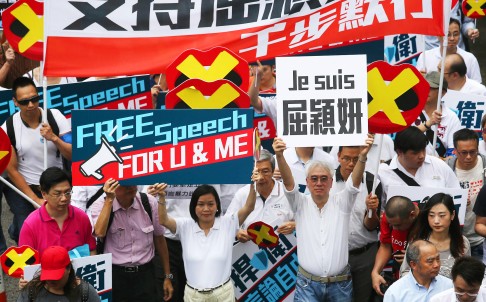
"A new dark force has emerged in today's
Hong Kong, and it's called the 'hegemony of democracy'," Wat was quoted as
writing in the open letter to thank her supporters. "They are more triad
than triads; they are effectively terrorists. Many are asking… why have some
of those close to us suddenly acted as if they are possessed and worship
this cult called democracy hysterically? I can tell you, don't waste time
finding the answer. Not everything can be explained. Just look at those who
live in comfort going to Syria to join ISIS."
The letter also confirmed her absence at
the march was down to police advising her not to attend any public event
until the "risk is gone", following the outrage at her column.
The piece referred to police wrongfully
charging a man with the mental age of six over the death of a 73-year-old
man in Sha Tin on May 2. He was questioned for 50 hours before his alibi
emerged.
The organiser claimed a turnout of 1,000
while police put the figure at 415.
(SCMP)
Hypocrisy is unacceptable, whether outside or within the democratic camp. By
Michael Chugani. May 29, 2015.
This is the last time you'll see me in this
space. Time for a change - for this space and for me. Change - a small word
that can mean so many things. American President Barack Obama used it to win
the world's most powerful political office. People say I have changed. One
long-time friend, who was somewhat intoxicated, even chided me in public. We
exchanged heated words, apologised, and still remain friends.
Have I really abandoned the democratic
cause? Not if I separate Hong Kong's so-called democrats from democracy. I
no longer blindly support the former but still cherish the latter.
Supporting our so-called democrats is not a prerequisite to be defined as
supporting democracy. No one has a monopoly on democracy. I voted for Obama
and Al Gore, not that I need to prove my democratic credentials.
If supporting democracy means applauding
those who demand the right to be heard but who hurl drinking glasses or
shout down others who speak, then it's not for me. I cannot bring myself to
support those who disrupt a school debating contest to heckle political foes
in the name of democracy.
It is not democracy but double standards
when our so-called democrats cry political persecution after one of their
own is fired as a radio host but say nothing when one of their own fires a
radio host who is not one of their own. What else but "hypocrites" do you
call those who say it is free speech to expose dirt on others, but call it
white terror when others dig up dirt on them?
Not giving a free-to-air TV licence to
Ricky Wong Wai-kay is a muzzling of the media but demanding the closure of
ATV is not. The Hong Kong Journalists Association, which now behaves like a
political party, raised hell over the firing of radio host Li Wei-ling but
said nothing when so-called pro-government columnist Chris Wat Wing-yin
received death threats and when ATV failed to pay its reporters. If pointing
out such hypocrisy makes me a democrat turncoat, I'll proudly wear that
label.
Am I a Beijing stooge for saying it is
folly to combine the fight for Hong Kong democracy with opposing the Chinese
Communist Party? If I am, then so are many of the students who fronted
Occupy Central. Here's why the Hong Kong University Students' Union will
hold its own June 4 vigil this year instead of joining the one in Victoria
Park: students want to pay tribute to victims of the crackdown, not use the
anniversary to oppose Chinese communism.
They believe what I believe: we must fight
for Hong Kong democracy for its own sake, not as part of an attempt to
democratise China. It is up to mainlanders to democratise China, not
Hongkongers.
Legislators Lee Cheuk-yan and Albert Ho
Chun-yan said this week fighting for Hong Kong democracy and against Chinese
communism is one and the same thing. I suggest they find wisdom from the
students.
No, I have not changed. It's the current
crop of so-called democrats who have warped the true meaning of democracy.
Waving the flag of genuine democracy doesn't make them true democrats.
(Speakout
HK) The Sorrow of the Journalists Association. By Kaizer Lau Ping-cheung.
May 30, 2015.
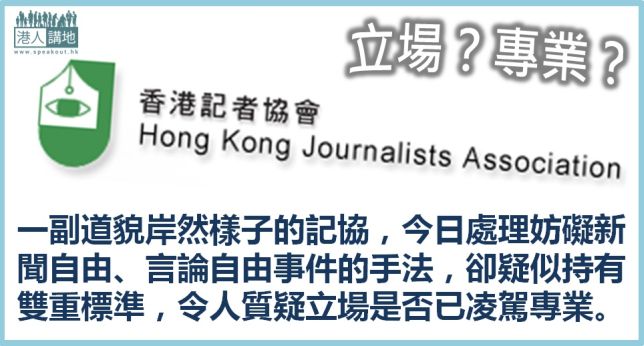
Once upon a time, we Hongkongers were proud
of our media. Every day, they gave us news reports. No matter whether they
are rightist, leftist or neutral, no matter what their political positions
were, they would still give us the facts. They came to us through
television, radio, print ... Journalism was a respected occupation. Coming
into the 21st century, a qualitative change has taken place, as can be seen
in the largest union for Hong Kong journalists -- the Hong Kong Journalists
Association.
For some time, the Journalists Association
has been criticized by members of the public for being partial to certain
media organizations and political camps. They were also indifferent to
aggressive methods of journalistic investigation and obscene/indecent
contents. Yet there were subjective impressions that are hard to pin down.
Over the past couple of years, the political position of the Journalists
Association has become shockingly blatant.
On February 23, 2014, the Journalists
Association instigated the "Stand firm and opposing silencing" march to
protest various incidents (such as individual newspapers losing their
advertising business; the replacement of the Ming Pao editor-in-chief; HKTV
not being issued a license; the dismissal of Commercial Radio talk show host
Lee Wai-ling; etc) that were construed to be political oppression. They
demanded the government to defend freedom of press, etc.
Afterwards, people raised questions. For
example, where is the evidence that some newspapers lose advertising
business due to political oppression? No evidence has ever been produced
except for the say-so of the newspapers. Their advertising business went
down, but so what? There can be many other reasons, such as a general
economic decline in the newspaper industry, a deterioration in quality, a
drop in circulation and other things. That is unknowable.
Did Commercial Radio really obey
a directive from a government official to dismiss host Lee Wai-ling? Later, the
farcical evidence turned out to be someone "feeling 100%" that there had
been political oppression. Under such circumstances, the Journalists
Associations still insisted on a high-profiled demonstration march.
Late February in 2014, former Ming Pao
editor-in-chief Kevin Lau was attacked and slashed six times. There was a
strong social reaction to condemn the violence. As the union for
journalists, it stands to reason that the Journalists Association should pay
a high degree of attention to this incident. But even though the police
could not find any evidence, the Journalists Association insisted that the
incident was related to freedom of press? Is that objective?
The objective effects of the Kevin Lau
affair are hard to tell, but it is easy to tell whether concrete evidence
exists. I
am not critical of the Journalists Association calling for a demonstration
march. After all, Kevin Lau is a veteran journalist and as the journalists'
union, it is reasonable for the Journalists Association to march and demand
the police investigate the case properly. Yet the serious-looking
Journalists Association' handling of the more recent incidents about freedom
of press and expression seemed to reek of non-professionalism and double
standards.
Early morning on April 27, TVB news
reporters were gathering news outside the Mong Kok police station when they
were surrounded by a large number of individuals. These people banged on the
TVB news vehicle and cursed out the cameramen inside the vehicle. Whereas
the Journalists Association used to react instantaneously, they waited
until people began to wonder about their non-response before finally
issued a condemnation late in the evening. The slowness and passiveness of
their response were incomprehensible.
More recently, the columnist Chris Wat
Wing-yin was issued death threats by radical democrats. They threatened to
"exterminate her entire family." Executive Council convenor Lam Woon-kwong
also received similar threats over the Internet. These incidents were widely
reported in the Internet media. The Journalists Association executives could
not have missed those reports. But the Journalists Associations has remained
silent throughout. When a certain legislator councilor questioned the
attitude of the Journalists Association, the JA chairperson Sham Yee-lan
questioned why this legislative councilor should be angling for the
Journalists Association. She also said that other news organizations have
not taken a position on this incident either.
Heavens! What kind of logical reasoning is
this? As the union for journalists, the Journalists Association carries the
aura of "defending freedom of press and expression." The aura allowed the
Journalists Association to make critical comments on current affairs. Even
before the facts are know, the Journalists Association is accustomed to
pounce out and make critical comments. I should ask the Journalists
Association: When you make comments about what interests you, do you
consider whether other news organizations have commented already? If and when other
organizations won't comment, should you with that halo around your head be
all the more ready to comment? Why do you choose to exclude yourself from
this current incident? The Journalists Association's response was like when
a thief is apprehended by the police, he would not admit to committing theft
but also accused the police of not arresting all other thieves.
The multiple reversals and contradictions
of the Journalists Association are illogical and unreasonable. They are so
risible and pathetic!
(Apple
Daily) Lee Wai-ling's column. March 31, 2017.
I just received the notice from the editor
that my Apple Daily column will end after today. Let me say farewell to the
readers who have supported me ...
- She is very extreme as well as naive. Her
writings sound as if they came from the Three Anti- campaign, the Five Anti-
campaign and the Red Guards of the Cultural Revolution. Political fights are
like mud-wrestling and not primary school students playing in the sandbox.
- During the 2017 Chief Executive, Lee Wai-ling
spread false information in order to convince everybody that John Tsang was
a shoo-in because the pro-establishment voters will vote for him during the
secret balloting. As a result, Next Media boss Jimmy Lai wrote an essay that
offended everybody. The election ended with John Tsang being blown away by
Carrie Lam. Of course, she should be fired immediately for professional
misconduct and misleading the boss as well as the general public.
- Good riddance! Can you please leave Hong
Kong? We have enough trash in this city already.
- Don't tell me that she is coming back on
April 1st because it was all an April's Fool joke.
- The logical thing after leaving Apple
Daily is to go work for Epoch Times. It is a step up in her society.
- (Oriental
Daily) April 1, 2017. On a year-to-year basis, Apple Daily revenues
fell by 25.2%, with 38.2% less advertising revenue and 10.5% less
distribution revenues.
Of course, they have to fire a few of their
very overpaid political hacks.
- [Spoof]
Hong Kong Journalists Association on Apple Daily killing off Lee Wai-ling's
column
"Freedom of press is dead"
"We are all Lee Wai-ling"
"The darkest day for media"
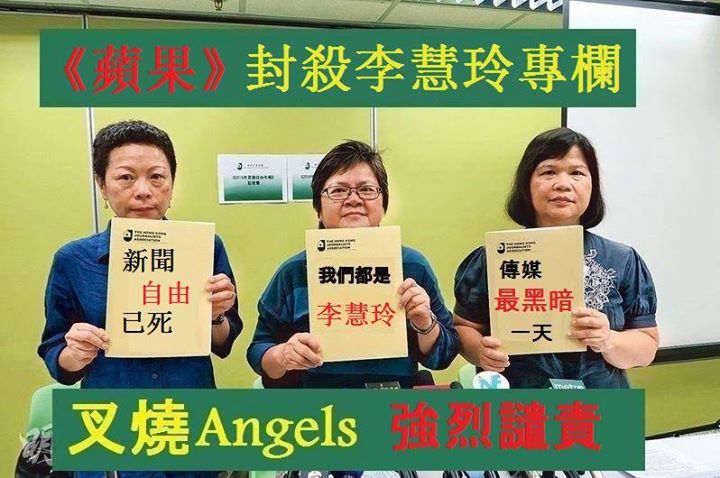
Statement from the Hong Kong Journalists Association: Donald Trump has shut
down the money flow so that Apple Daily had to shut down Lee Wai-ling's
column. This is a major interference with freedom of press in Hong Kong. Our
Association expresses the most profound regret and we will hold a
black-dress demonstration march on Ching Ming Festival (from Justice Drive
in Central to the US Consulate on Garden Road) in order to express our
discontent.

Background:
Ming Pao Said, Chris Wat Wing-yin Said
(Ming Pao) May 22, 2015.
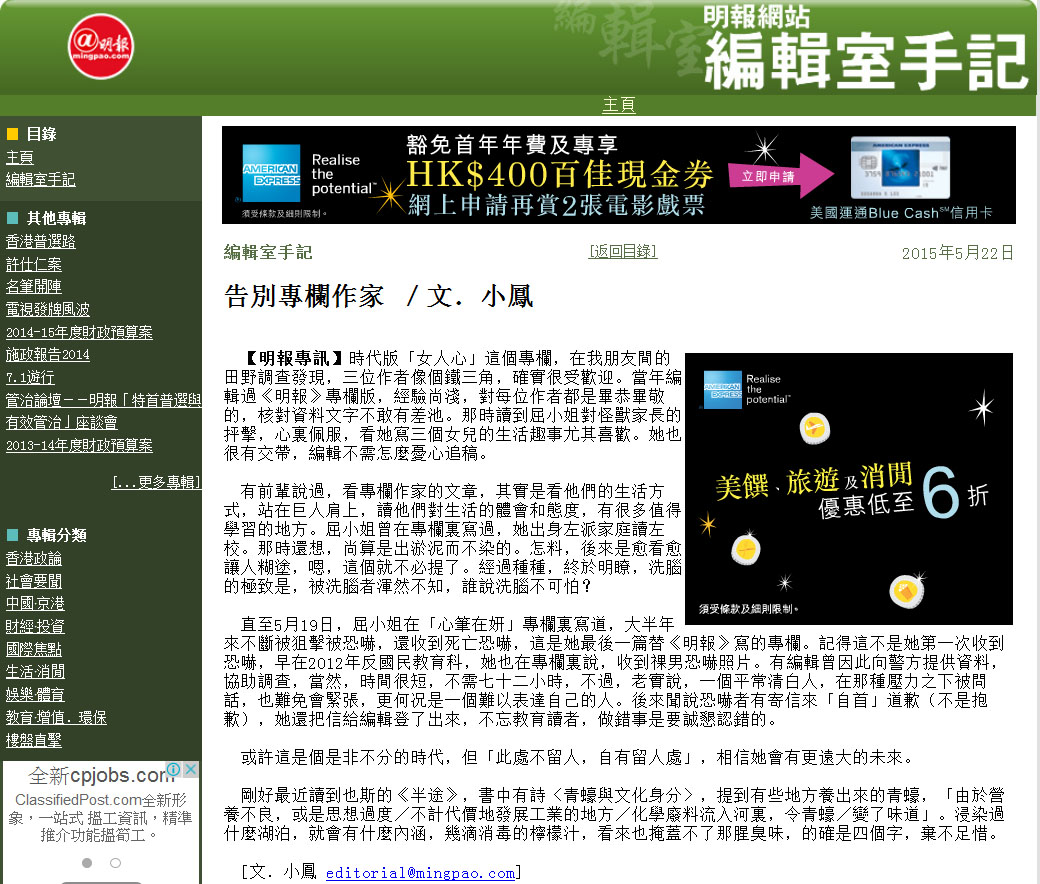
(in translation)
According to a field study among my
friends, the three women writers in the <Women's Hearts> column of the Era
page of this newspapers are quite popular. When I was younger, I edited the
Ming Pao columns. I was inexperienced so I respected all the writers
greatly. I made sure that I proof-read everything carefully. When I read
Chris Wat Wing-yin's criticisms of Monster Parents, I was deeply impressed.
I particularly like her description of her life with her three daughters.
She was also very responsible, so that the editor does not have to remind
her about deadlines.
A veteran said that the reading the
writings of a columnist is to read about their lifestyles. There is plenty
to learn by standing on giants' shoulders and read about their understanding
of and attitudes towards life. Ms. Wat wrote in her column that she grew up
in a leftist family and attended a leftist school. At the time, I thought
that she could still be considered as coming out of mud without being
dirtied. But the more I read, the more I got confused. Hmmm, let's not talk
about that. After all that, I finally recognized that the most effective
brainwashing is one in which the brainwashed person isn't even aware that it
is happening. Who says brainwashing isn't scary?"
On May 19, Ms. Wat wrote in her column that
after being attacked and threatened over the past few months, including
receiving death threats, she was writing her last Ming Pao column. I recall
that this was not the first time that she received threats. During the 2012
campaign against national education, she said that she received a threat in
the form of a photo of a naked man. An editor forwarded the information to
the police and she was asked to assist in the investigation. Of course, in a
short time of less than 72 hours, any innocent person would be nervous,
especially for someone who doesn't know how to express herself. Later on, I
gathered that the threat-issuer sent a letter to identify himself (but not
to apologize) and she let the editor publish the letter without forgetting
to educate readers that one must honestly acknowledge one's mistakes.
This is an era in which right and wrong are
possibly indistinguishable. If Ms. Wat cannot be here, she will probably
have a greater future elsewhere.
"I have just been reading Leung Ping-kwan's
book <Half Way>. Inside the book is the poem <Oysters and cultural
identity>. He said that the taste of some oysters are changed because of
"malnutrition or over-thinking/relentless industrial over-expansion/chemical
wastes flowing into the river." Which lake the oyster lived in, whatever
substance it will contain. A few drops of disinfecting lemon juice cannot
cover up the stench. Indeed, it is better off to discard it."
(HKG
Pao) May 27, 2015.
In Hong Kong, university admission
is based only on exam results and not on which middle schools were attended. But
Ming Pao wrote: "Wat Wing-yin grew up in a leftist family and attended a leftist
school. At the time, she was still counted as being clean in spite of living in
a pond of dirty mud ..." Are "leftist family" and "leftist school" original
sins? Why does the former "Number 1 in Credibility" newspaper Ming Pao want to
insult all the people who ever attended leftist schools?
What are leftist schools? In Hong
Kong, this refers to certain pro-China schools, such as Pui Kiu College, Fu Kien
Secondary School, Island Middle School, Hon Wah College, Workers' Children
Secondary School, etc. These schools and their graduates over the past several
decades have just been slapped by Ming Pao in one swell blow.
Chris Wat Wing-yin once worked for
Jimmy Lai Chi-ying as the deputy editor-in-chief of Next Weekly. She left to
become a columnist and contributed to Ming Pao. For this, she earned the praise:
"she was still counted as being clean in spite of living in a pond of dirty
mud." How do other leftist school students clean their own names?
If such is the case for leftist
schools in Hong Kong, then what about the mainland schools? According to Ming
Pao, all leftist schools are ponds of mud. All schools in the People's Republic
of China are leftist schools and therefore ponds of mud as well. Peking
University, Tsing Hua University, Fudan University ... does Ming Pao think that they
are all ponds of mud? Any Chinese citizen who has ever attended school in China must come
from a heap of dirty mud?
The seven members of the Politburo
graduated from Peking University, Tsing Hua University, Xiamen University, Xibei
University, Harbin Engineering University, Central Party School of the Communist
Party and the Kim Il-sung University. They not only attended those 'leftist'
schools but they also came from 'leftist' families. In your eyes, are they heaps
of dirty mud?
Ming Pao did not stop at this.
They also quoted the analogy of the oyster: "A few drops of disinfecting lemon
juice cannot cover up the stench. Indeed, it is better off to discard it." Does
the stench refer only to Wat Wing-yin? Or to all leftist school alumni? The
Peking University, Tsinghua University, Xibei University alumni too?
... Question: Are prejudicial
attitudes towards leftist school students an official policy of the Ming Pao Group?
(Bastille
Post) May 30, 2015.
On May 22, the Ming Pao Editorial Room
Notes section published by a writer using the penname Little Phoenix. She
wrote: "Ms. Wat mentioned in her column that she came from a leftist family
and attended a leftist school. At the time, I thought that she could still
be considered as coming out of mud without being dirtied. But the more I
read, the more I got confused. Hmmm, let's not talk about that. After all
that, I finally recognized that the most effective brainwashing is one in
which the brainwashed person isn't even aware that it is happening. Who says
brainwashing isn't scary?"
The most controversial part of that essay
is in the largest paragraph: "I have just been reading Leung Ping-kwan's
book <Half Way>. Inside the book is the poem <Oysters and cultural
identity>. He said that the taste of some oysters are changed because of
"malnutrition or over-thinking/relentless industrial over-expansion/chemical
wastes flowing into the river." Which lake the oyster lived in, whatever
substance it will contain. A few drops of disinfecting lemon juice cannot
cover up the stench. Indeed, it is better off to discard it."
After the essay was published, the leftists
schools were in an uproar. Reportedly, Ming Pao received quite a few
complaints. Finally on May 28, Ming Pao began to state on top of its Editorial
Room Notes: "The essays do not represent the position of Ming Pao." At the
bottom right-hand bottom of the column, a long disclaimer is made to the
effect that Editorial Room Notes contains the essays that certain reporters
in the Ming Pao editorial room who wrote for themselves to share what
they came across during their reportage or what they personally feel, and
therefore do not represent the position of Ming Pao."
But the matter has not died away. Hong Kong
Federation of Education Workers Raphael Wong Kwan-yu said that he had been a
principal of the leftist Fu Kien Middle School (Siu Sai Wan campus) and
while it would be commonplace for Ming Pao to have disagreements with its
writers, "when gentlemen break up, they don't say nasty things.". However,
Ming Pao's nasty words were directed at the totality of all patriotic
schools! He said that the newspapers doesn't understand that "character is
more important than faith" and "politics should not overwhelm conscience."
He called for all those who have been swept aside as "brainwashed" and
"filthy mud" to quit buying Ming Pao.
Ming Pao and the writer Little Phoenix have
not yet replied formally.
(HKG
Pao) May 30, 2015.
The Ming Pao Editorial Room Notes published
the very insulting theory of Dirty Mud. Afterwards, the newspaper claimed
that the column does not reflect the position of the newspaper itself. Chris
Wat Wing-yin called the disclaimer absurd: "The Editorial Room Notes comes
out under the aegis of the Editorial Room. No matter who wrote it, the essay represents
the newspaper. This is common sense."
As for the Ming Pao chief editor Chong
Tien-siong saying that he respects "the individual expressions by
colleagues," Wat thinks that this cannot be an excuse for management to
shirk their responsibility: "If the column gets into trouble (such as
libel), who will go to jail? Under the law, the chief editor is liable.
Respecting your colleagues to libel others? Can reporters say whatever they
want for personal reasons? Can you curse out whoever you
want?"
As for the "dirty mud," Wat laughs it off:
"After reading that essay, some old schoolmates thought that it violates the
anti-discrimination statutes. Other friends said that I was the one who was
not muddied, but it was Next Media (Apple Daily/Next Magazine) and Ming Pao
which are mired in mud."
She said: The theory of dirty mud stems
from the Black Five Types of the Cultural Revolution. Your family background
determines everything about you. Anyone who says this should read up on the
ten years of the Cultural Revolution. "If my family background determines
everything that I do and say today, then what does my decade working for
Jimmy Lai show?"
When a so-called major newspaper attacks a
columnist who has written for it for over a decade, the 'intolerance' in
astonishing. If what they say is true but they allowed her essays to be
continuously published for more than a decade, then doesn't it say a lot
about their judgment?
(HKG
Pao with audio) June 1, 2015.
The Ming Pao Editorial Room Notes' Theory
of Dirty Mud attacking popular columnist Chris Wat Wing-yin was written by a
Ming Pao worker, but she used a penname to conceal her identity to launch
her sneak attack.
Someone in Ming Pao disapproved of such
ungentlemanly behavior and told us the true identity of Little Phoenix. She is
the Ming Pao Sunday supplement editor Helen Lai Pui-fun. If so, then a
managing editor used a pseudonym in a column to slur someone. Isn't that
using a public facility for private purposes?
Our reporter telephoned Lai for
confirmation. But she said "No comment" repeatedly, occasionally demanded to
know the identity of the caller. However, she never denied that she was
Little Phoenix. Is she the one? You can decide for yourself. Here is the
audio recording of the telephone call.
According to information, Lai worked from
the bottom up. Over many years, she has published essays in the supplement
section in praise of the pan-democrats. For example, she wrote how she saw
and heard in the July 1st marches and the anti-National Education movement.
She described how "the Umbrella Movement brought out a generation of obedient,
decent and brilliant students." She wrote: "I don't want China to become the
mainland someday." She also wrote: "The police don't have to change jobs to
act like gangsters." Her political position is clearly defined with a strong localist flavor.
If Lai is indeed Little Phoenix, then the
disclaimer that Ming Pao added for Editorial Room Notes is even more ironic.
If a managing editor does not represent Ming Pao, who does? Maybe the
editor-in-chief can't even represent Ming Pao.
Internet comments:
- (Sina.com.hk)
May 16, 2015.
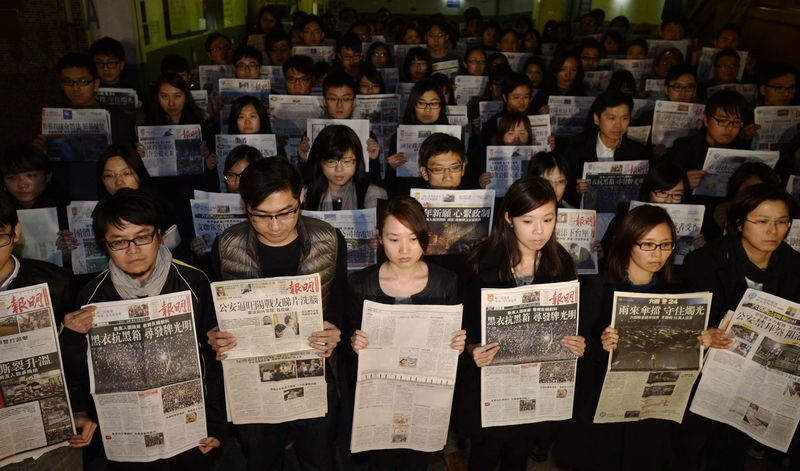
Ming Pao union workers write open letter to
management
Recently, many workers have quit Ming Pao.
According to the Ming Pao workers union, about 10% of the workers have left
in the past four months, some of these being experienced veterans. However,
management has failed to replace those who left. Specifically, the
investigative reporting team is down to two reporters from what used to be
six reporters. The workers demand to speak to management about the
situation.
- There are only two fictional writers instead of the regular six. So what?
- Those who left probably thought that their creative writing skills are
better at Apple Daily. Former editor-in-chief Kevin Lau wanted to turn Ming
Pao into Apple Daily. He failed. Therefore, the workers are going to Apple
Daily instead.
- They're better off gone, because that will give Ming Pao a chance to
become a regular newspapers.
- Chris Wat Wing-yin is an individual
expressing her opinions in a newspaper column. She is exercising her freedom
of expression, including deciding not to write for Ming Pao. But for Ming
Pao to engage in a cheap-shot rebuttal through a pseudonymous Editorial Room
Note is unbecoming. Where were the gatekeepers to guard against the obvious
bigotry? When the inevitable blowback occurred, Ming Pao resorted to denial
of institutional responsibility and blamed everything on its pseudonymous
reporter. This is even more unbecoming and unseemly. Who let this sort of
rubbish get printed?
- Here is an example of the egregious
mistakes that are creeping all over Ming Pao:
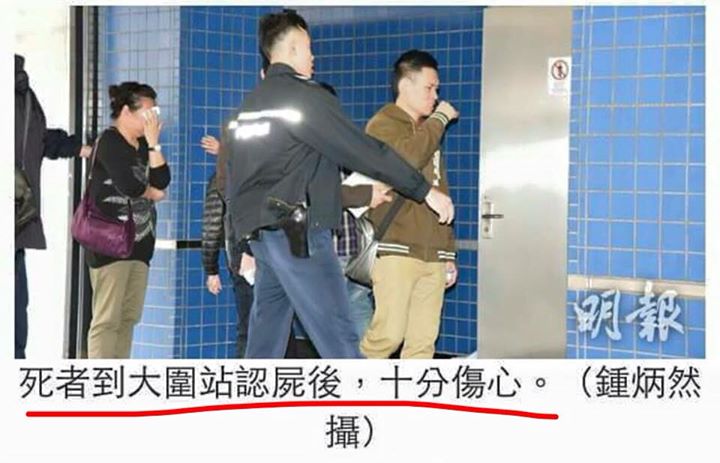
The caption is: "The deceased went to Tai Wai Station to identify the
corpse, and became very heartbroken afterwards." Well, dead people can't go
to identify a corpse, because they are dead by definition. The Ming Pao
reporters and editors don't even know that. Now you know why they are no
longer "Number One in Credibility."
- Well, Ming Pao has a demographic problem
-- its regular readers are getting old and dying off, and young people don't
read newspapers anymore. Under such circumstances, the union workers still
want management to maintain the profligate spending of the bygone era?
- Even Apple Daily has a major circulation problem (and hence reduced
advertising income). The Ming Pao workers should not expect Apple Daily to
hire them.
- Ming Pao now says that the Ming Pao
Editorial Room Notes column represent the opinions of individual journalists
which are not necessarily those of the newspaper itself. Post facto
wishy-washy-ness. Well, this doesn't relieve the more fundamental question:
Why does Ming Pao hire a seriously bigoted journalist, one who thinks all
certain schools are ponds of dirty mud and all those who attended those
schools have been brainwashed. The New York Times could hire a bigoted
columnist, but not a bigoted reporter who doesn't mind sharing her bigoted
views in an Editorial Room Notes column.
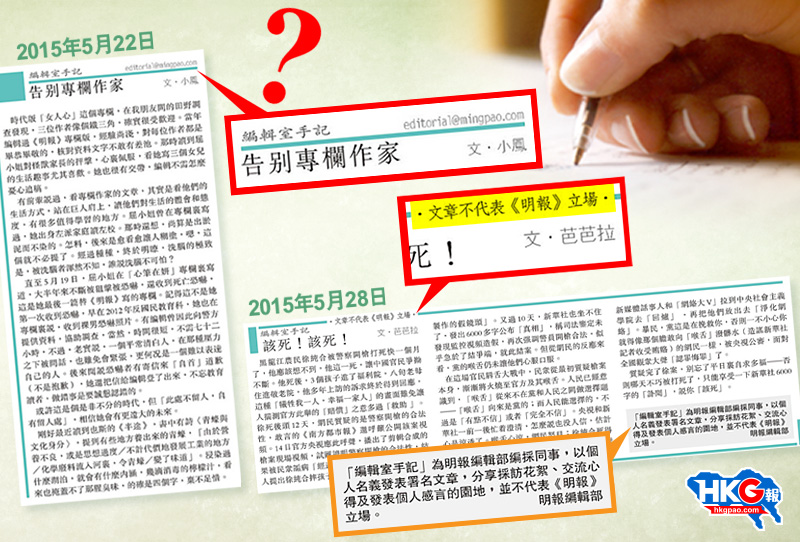
The original column on May 22 didn't carry any explanation beyond that this
note came from the Editorial Room. The column on May 28 now contains the
disclaimer that the essay does not represent the position of Ming Pao. The
original column on May 22 left a contact email of
editorial@mingpao.com, which is
clearly directed to the editorial group. The column on Ming Pao has now removed the
email as if it no longer has anything to do with the editorial group
anymore. So who was in charge to let this slip through? Who is in charge now
to make sure that it does not recur? No explanation so far.
- Haruki Murakami has a quote:
“If there is a hard, high wall and an egg
that breaks against it, no matter how right the wall or how wrong the egg,
I will stand on the side of the egg. Why? Because each of us is an egg, a
unique soul enclosed in a fragile egg. Each of us is confronting a high
wall. The high wall is the system which forces us to do the things we
would not ordinarily see fit to do as individuals . . . We are all human
beings, individuals, fragile eggs. We have no hope against the wall: it's
too high, too dark, too cold. To fight the wall, we must join our souls
together for warmth, strength. We must not let the system control us --
create who we are. It is we who created the system. (Jerusalem Prize
acceptance speech, JERUSALEM POST, Feb. 15, 2009)”
Chris Wat Wing-yin is the egg and Ming Pao
is the hard, high wall that wants her to write certain things (but not
others) in a certain way (but not in other ways).
There are many famous leftist school alumni
in Hong Kong society. For example, the Apple Daily/Next Magazine columnist
Chip
Tsao attended
Pui Kui Middle School.
- Chris Wat Wing-yin is a columnist who
writes about her personal opinions. She is not a reporter in her present
capacity. Therefore the Journalists Association is not obliged to take up
her case, because she is not a journalist.
- Really? What about big-mouthed Lee Wai-ling? She runs a talk show. She is
certainly not gathering or reporting news? For example, with respect to her
case, she said that she is 100% certain that it was political oppression
even though there is not a scintilla of supporting evidence.
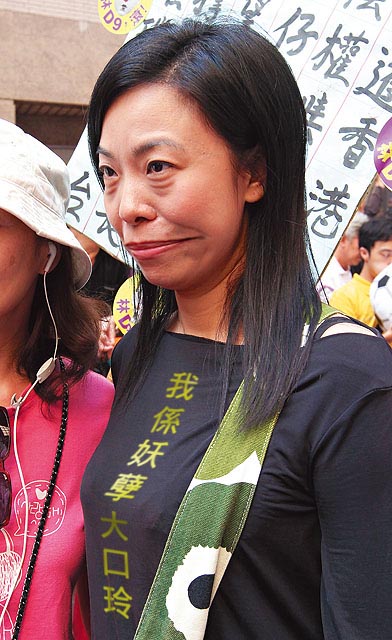
Big-mouthed Lee Wai-ling
- A few days ago,
Ming Pao and
Apple
Daily reported that when Lisa Wong cried out that she supported the
government's 2017 Chief Executive election reform proposal, she was roundly
booed by the audience at the Joseph Koo Retirement Ceremony. With due
respect, their reports were reportage (that is, words without other
supporting evidence), Meanwhile, you can watch the relevant video on
YouTube. Was there the sound of booing? Or applause? You can let
your own lying eyes/ears decide. There is no better explanation about the
cause of the decline of these two newspapers.
Hong Kong Crimes Ordinance: Access to computer with criminal or dishonest intent
1) Any person who obtains access to a
computer-
(a) with intent to commit an offence;
(b) with a dishonest intent to deceive;
(c) with a view to dishonest gain for himself or another; or
(d) with a dishonest intent to cause loss to another,
whether on the same occasion as he obtains
such access or on any future occasion, commits an offence and is liable on
conviction upon indictment to imprisonment for 5 years.
(Oriental
Daily) May 28, 2015.
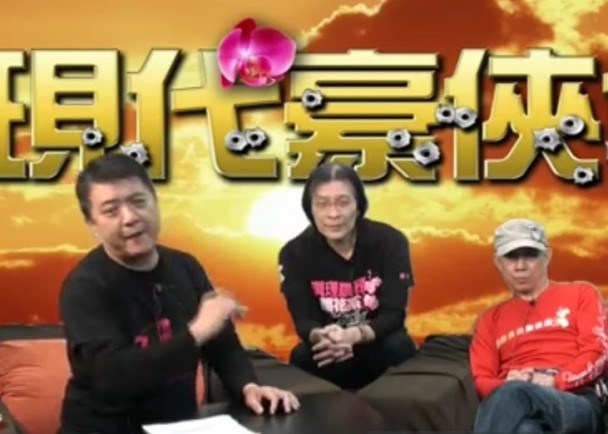 \
\
The Hong Kong Police's Cyber
Security and Technology Crime Bureau arrested DLLM Orchid (note: the
organization's name is the homonym for "Fuck your mother's stinking rotten cunt"
in Cantonese) chairman Barry Ma and member Chan Man for criminal use of
computer. Previously on the Internet show <Legends
of Modern Knights>, DLLM Orchid members have said things like: "If you
are suicidal, you should chop up a few policemen first" and "Even if you have
terminal cancer, you should kill some policemen first."
(Sing
Tao) May 27, 2015.
The radical group DLLM Orchid
publicly appealed for "those with suicidal tendencies to chop up a few policemen
first before dying." On the show, the five hosts said that the police are
lower-class people. Barry Ma said that he would continue to tell people to hate
the police. Big Mike said: "As Chan Man says, it is reasonable to kill police."
Ma responded: "No, you have to be tough to kill police." Chan Man who ran for
King's Park District Councilor in 2013 jumped in: "All those persons with
suicidal tendencies, I urge you to chop up a few policemen first before you
die." Big Mike said: "You die together with the policemen." Ma said: "We'll use
our thought energy. We hope that Tough Guy Man will get cancer. If he gets
cancer, he will chop up a few people." Chan replied: "At least five of them."
According to a legal expert,
spreading walk about attacking or killing police officers on the Internet may be
violating Hong Kong Crime Ordinances Chapter 221 Section 101C on "aiding,
abetting, counseling or procuring that offence."
But if the five persons were just
joking, then they may still be violating Hong Kong Crime Ordinances Chapter 200
Section 160 on "access
to computer with criminal or dishonest intent." Some speeches are a
crime just to talk about them. A previous example was the person who said on the
Internet that he wanted to organize a flash rape gang. The crime has a maximum
punishment of 5 years in jail.
On the May 14th program titled
"There are no police in Hong Kong, only black police," Barry Ma talked about the
wrongful arrest of the autistic individual and said: "If I saw the bald-headed,
goddamned dick (=former police commission Tsang Wai-hung) in the street, I would
fucking beat him up. At fucking worst, I would be sentenced to a good behavior
bond." Ma said that the police have no conscience because they wrongfully
accused an autistic person. "The people in that police station fucking deserved
to be beaten to death. They should fucking be burned to death. Their whole
families should be dead. They fucking deserve to die."
Recently on Facebook, Barry Ma
also said that the columnist Wat Wing-yin
should have have entire family exterminated because she supports the police.
Elsewhere, Barry Ma wrote on his Facebook on May 24th: "All the pan-democrats
who go to Shenzhen to meet with central government officials should have their
families exterminated for good reason."
(EJinsight)
May 28, 2015.
Barry
Ma Kin-yin, chairman of local radical group The Faculty of Orchid Gardening
was arrested after he posted on his Facebook page that all five members of a
columnist’s family should be killed. Ma attacked former Ming Pao columnist
Chris Wat Wing-yin for her pro-police stance in the recent saga of the
wrongful arrest of an autistic man.
He was
arrested on suspicion of accessing a computer with criminal or dishonest
intent, Apple Daily reported Thursday.
Police confirmed that Ma, 47, was arrested in
Tai Po Wednesday. Two other members of Orchid Gardening were arrested, for
allegedly assaulting police officers, Sing Tao Daily reported. Chan Man, 63,
was arrested in Tin Shui Wai Wednesday and Ho Kai-ming,
58, in Tai Po early Thursday.
Ta
Kung Po reported that on an online talk show Ma and Chan had called for
suicidal people to kill a few police officers.
While video recordings of the show have now
been removed from the web, reports said the arrests were related to those
remarks.
Eric Cheung, principal lecturer in the law
faculty at the University of Hong Kong, said the offense of accessing a
computer with criminal or dishonest intent was originally aimed at computer
hackers, but the law has been used more broadly as it was written rather
vaguely. There is a large degree of subjectivity in determining what is
dishonest, Cheung told Apple Daily. He said police should consider pressing
criminal intimidation charges if there is enough evidence to make a case, as
using a charge of accessing computer with criminal or dishonest intent could
raise the question whether the authorities were trying to suppress freedom
of speech.
(Ta
Kung Po) May 26, 2015.
DLLM Orchid was formed when
certain radicals in People Power broke away to form a new group in 2012. Most
members are middle-aged grassroots. In August 2013, primary school teacher
Alpais Lam leaped to fame when she used foul language to curse out the police in
Mong Kok. In demonstrators, DLLM Orchid hoisted the British Dragon/Lion flag for
Hong Kong independence.
(Wen
Wei Po) May 28, 2015.
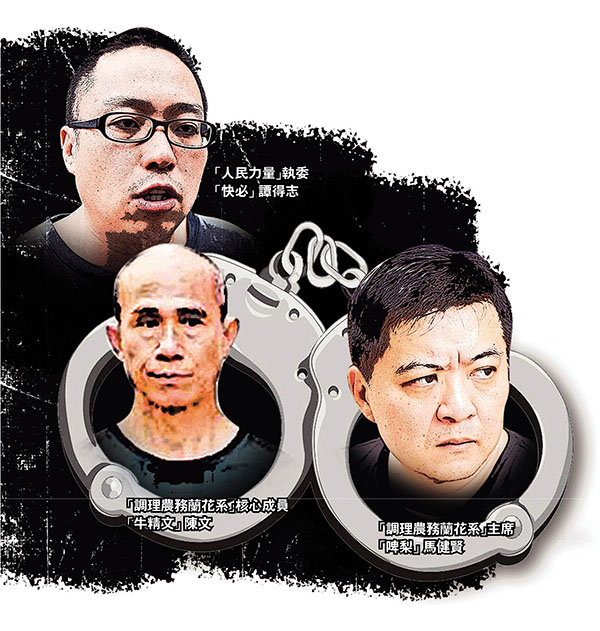
People Power's Tam Tak-chi, DLLM Orchid members
Chan Man and Barry Ma
People Power committee member Tam
Tak-chi had previously called for Internet users to visit columnist Wat Wing-yin
at home to "give blessing" to her whole family. Yesterday afternoon, Tam posted
on his Facebook there are are persons suspected to be Blue Ribbon policemen
waiting outside his door. He claimed to be at home. He uploaded two photos that
were taken through a window crack showing people waiting outside. He said that
the photos were taken by the Artificial Intelligence robot in his home.
He said that he will be taking
phones from unidentified numbers. "If you want to give me blessing or cause me
trouble, please come down to the Memehk office in Taikoo. I usually do the
program at 9pm and leave at 1130pm." Afterwards he posted that someone called
and left a message: "I am a policeman. I want to discuss something with you.
Please reply." but he said: I am not sure if you are a Blue Ribbon or a
policeman. Even if so, I won't discuss anything with the police."
According to information, the
police went to Tam's home yesterday to ask him to come down to the police
station to assist in the investigation of an Internet threat. When the police
knocked on the door, they knew that Tam was inside. But nobody came to the door.
(Oriental
Daily) May 29, 2015.
People Power member Tam Tak-chi
was arrested today around noon in Central. According to information, the cause
was his Facebook post about placing homemade bombs on the route to be taken by
the funeral hearse of the late Federation of Trade Unions president Yeung Kwong.
"Boxes with the words 'Home made bombs, compatriots do not approach'
will be placed along the route of the funeral hearse. Isn't that very
appropriate? If you open it, there is an explosion of party firecrackers ..."
Internet comments:
- Freedom of speech is dead in
Hong Kong. All these five people said was that if you have suicidal tendency,
you should kill some policemen; if you have terminal cancer, you should kill
some policemen. These are things that reasonable people do all the time. They
didn't say: If you get up on the wrong side of the bed this morning, you should
kill some policemen.
- Even if you get up on the right side of the bed this morning, you should kill
some policemen too.
- Freedom of speech is not dead in
Hong Kong. But you have to be careful about whom you say to kill. Here is some
data gleaned from recent cases:
On the YES side are: The Chief Executive and senior cabinet members; policemen;
graduates of leftist schools; pro-establishment activists (Robert Chow, Leticia
Lee, Ko Tat-bun, etc); pro-establishment journalists; certain retired Chinese
senior officials (Li Peng, Jiang Zemin); ...
On the NO side are: President Barack Obama; Caucasians in general; court
magistrates and judges; pro-democracy thinkers (Benny Tai etc); pro-democracy
activists (Joshua Wong, Daisy Chan, Wong Yeung-tat, etc); pro-democracy
journalists (Kevin Lau etc); ...
However, it is not clear whether or not you can threaten to kill Barry Ma,
because of his immense unpopularity across the entire political spectrum.
- In this modern era, the Valiant
Knights of the Round Table are just a bunch of big-talking middle-aged men
telling us about their fantastical conquests and triumphs. All this takes place
live on the Internet with fewer than 10 listeners.
- This Chan Man character even ran
for the middle-/upper-class King's Park district councilor. With elected
officials like these, we have everything to be afraid of. Fortunately, Chan Man
was routed by a wide margin.
- The newspapers kept harping on
the fact that the Occupy Central supporters are younger, better educated and
more affluent. Barry Ma is a 47-year-old ex-real estate agent. Chan Man is a
63-year-old electric appliance technician. They are not young, they are not
better educated and they are not more affluent.
- Let me foretell what the
magistrate will say: "There is no evidence to show that his speeches have
created imminent danger to police officers. I also question whether there is
sufficient justification to file these charges. This is a waste of the court's
time. The defendants were clearly joking. Besides, the defendants have expressed
contrition. Since they have no prior criminal records, they should be given an
opportunity. Therefore I rule that they be found not guilty and released
immediately."
- When the time comes, they will also come up with various excuses: I have
bipolar disorder tendencies; my girlfriend just ditched me; I didn't understand
the law; etc.
- Foul-mouthed teacher Alpais Lam
is a member of DLLM Orchid and she recently expressed the wish to commit suicide
(see #238). So she is prime material
to go out there and kill a few policemen. But she also wants to continue to
teach primary school children, because she says that she excels the job (in
spite of certain mental problems outside of school). Why should she do? What is
chairman Barry Ma's advice?
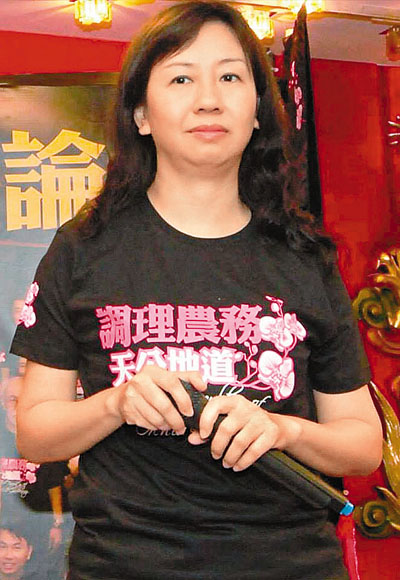
Alpais Lam wearing her DLLM Orchid t-shirt
- Good video of Hong Kong
democracy in action:
DLLM
Orchid versus Voice of Loving Hong Kong. Shouting shouting shouting.
Special middle-fingered action beginning at 5:37.
- (The
Guardian) January 16, 2015.
Pope Francis has said there are limits to
freedom of expression and that following the Charlie Hebdo attack in Paris
“one cannot make fun of faith”.
On a plane from Sri Lanka to the
Philippines, the largest Catholic majority country in Asia, the pope said
freedom of speech was a fundamental human right but “every religion has
its dignity”.
Asked about the attack that killed 12
people at the offices of Charlie Hebdo – targeted because it had printed
depictions of the prophet Muhammad – he said: “One cannot provoke, one
cannot insult other people’s faith, one cannot make fun of faith. There is
a limit. Every religion has its dignity … in freedom of expression there
are limits.”
He gestured to Alberto Gasparri, who
organises papal trips and was standing by his side, and added: “If my good
friend Dr Gasparri says a curse word against my mother, he can expect a
punch. It’s normal. It’s normal. You cannot provoke. You cannot insult the
faith of others. You cannot make fun of the faith of others.”
Cautioning against provocation he said
the right to liberty of expression came with the obligation to speak for
“the common good”.
- (Wen
Wei Po) May 29, 2015.
The Hong Kong Independence Alliance
posted a number of photos on its Facebook showing bleaching and other
chemical agents, labeling the page as "how to manufacture homemade
destructive quick lime bombs and homemade chemical warfare weapons." They
taught people how to mix quick lime with water to manufacture Quick Lime
Bombs, which they said are even more powerful than Cola Bombs and Petrol
Bombs in being able to smash steel-reinforced glass. They said that if you
toss a Quick Lime Bomb at the enemy, "all enemies within a one hundred
square meter area will be knocked down."
In addition, there are other photos of
weaponry, including guns, slings and laser pens alongside with maps of the
China Liaison Office and the People's Liberation Army garrisons. The laser
pens are described as "a good help in taking care of the China Liaison
Office and the People's Liberation Army garrison." According to
information, the laser pens are industrial strength (5,000 centiwatts)
with a maximum temperature of 167 degrees centigrade, enough to cause
blindness.
Q1. Does the government's proposal
for universal suffrage make the election system more democratic, or less, or the
same?
71%: More
11%: Less
11%: The same
4%: Hard to day
3%: No opinion
Q2. Do you think that the
Legislative Council should pass the government's proposal for universal
suffrage?
64%: Yes
28%: No
6%: Hard to say/don't care
2%: No opinion
Q3. If the legislators' position
on the constitutional reform proposal runs opposite to majority opinion, do you
think the legislators should vote according to majority opinion?
77%: Yes
12%: No
7%: Hard to say/don't care
4%: No opinion
Q4. How confident are you that the
Legislative Council will pass the government's proposal for 2017 Chief Executive
election?
12%: Very confident
13%: Somewhat confident
36%: Not a lot of confidence
21%: No confidence
14%: Hard to say
4%: No opinion
Q5. Do you think that the
legislators can get a more democratic Chief Executive election by vetoing the
government's proposal?
20%: Yes
71%: No
7%: Hard to say
2%: No opinion
Q6. If there is no universal
suffrage for Chief Executive in 2017, how many years later do you think it will
come?
11%: 5 years
20%: 10 years
14%: 15 years
13%: 20 or more years
36%: Hard to say
6%: No opinion
Q7. If the Legislative Council
vetoes the proposal, who do you think is the biggest loser?
10%: The central government
16%: The pan-democrats
48%: The people of Hong Kong
11%: The Hong Kong SAR government
5%: The pro-establishment camp
2%: Others
5%: Nobody loses
2%: Hard to say
1%: No opinion
Q8. If the Legislative Council
vetoes the proposal, who do you think is most responsible?
17%: The central government
47%: The pan-democrats
2%: The people of Hong Kong
19%: The Hong Kong SAR government
3%: The pro-establishment camp
2%: Others
8%: Hard to say
2%: No opinion
Q9. If the pan-democrats veto the
proposal, will you vote for any such pan-democrat in the next election?
22%: Yes
59%: No
14%: Undecided
5%: No opinion
(Oriental
Daily with video) May 27, 2015.
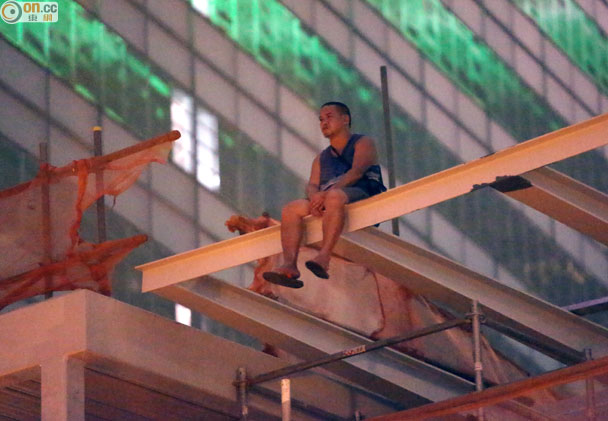
Last evening at 8pm, the Occupy
Central volunteer Ng Ting-pong suddenly climbed up an under-construction
pedestrian overpass from Tim Mei Avenue to CITIC Tower in Admiralty and sat on an
iron T-bar. The police, the firemen and ambulance crews rushed to the scene and
secured the area. They inflated a rescue air cushion first. Then they spoke to
him. At 930pm, Ng was persuaded to come down.
Who is Ng Ting-pong? What did he
do during the Occupy Central? Here are some blasts from the past:

(YouTube)
Occupy Mong Kok, November 12, 2014.
0:01 (Ng) You stand there and you
think you are great.
0:05 (Voice) Uncle Pong, uncle Pong, you are a big star. You are a big People
Power star. Do you have anything to say? Are you not satisfied with
something? Say so.
0:12 (Ng) I have done better than you.
0:38 (Ng) Chase me away? Nobody can chase me away.
0:44 (Ng) What feelings? What feelings should I have?
0:50 (Young man) You don't have to say that.
0:51 (Ng) Fucking drop dead!
0:53 (Voice) Mong Kok is the turf of People Power and Civic Passion. This is
their turf. Their home court.
0:57 (Young man) Whose turf?
0:58 (Voice) Their home court. I think so.
1:01 (Young man) Who says that this is their home court? People Power?
1:03 (Voice) People Power
1:04 (Young man) Are they so fucking powerful?
1:05 (Ng) Did I say "People Power"? Did I say that I am with People Power?
1:08 (Young man) I did not say that you are with People Power.
1:11 (Ng) You just said it!
1:12 (Young man) I did not say that you are with People Power. I only asked who
is saying that People Power is fucking powerful. I will give the flag back to
the political parties. I tell you.
1:24 (Ng) Why are you telling me to go back to Admiralty?
1:26 (Young man) Admiralty is a serene place. You are very uncalm, so you should
please go to Admiralty.
1:29 (Ng) Please fucking what! What is your basis for telling me to leave?
1:32 (Young man) Because you are not calm now.
1:33 (Ng) It is normal for me not to be calm. Are you in charge? If you tell me
to go, I'll have to go?
1:37 (Young man) Alright, alright.
(YouTube)
Occupy Admiralty. December 9, 2014.
(Ng) He is completely not a Hong
Kong's bird nest. He is a bastard dog. At our Occupy Mong Kok movement, a
brother was injured by the police. Contusions in his leg. Near the main artery.
He can't move his lower limbs. Thank you, you two middle schools students for
giving us two beautiful signatures.
(East Week) Volume 583. October 29, 2014.
Ng Ting-pong has been around Occupy Mong
Kok for the past month, mainly to keep guard over the materiel station.
During the night, he slept in a canvas bed next to the materiel station. In
the morning, he goes to MacPherson Park to wash up. Whenever there are
clashes, he is the first to rush over topless and spout foul language. For
this reason, he has gained a reputation as "Brother Pong."
Between 1993 and 2007, Ng Ting-pong has
gone to jail more than ten times for burglary and other crimes. Since
coming out of jail, he has been sleeping in the street. He was a delivery
person for a small Hung Hom restaurant and was earning $9,800 a month. After
joining Occupy, he no longer works. So what does he live on? He said: "I am
half a
Jianghu
(a community of martial artists, nobles, gangsters, thieves, beggars,
priests, healers, merchants, prostitutes and craftsmen where all conflicts
are resolved through mediation, negotiation or force) person. Over all these
years, I have slept all over the place. There was one week in which I ate
only 9 meals."
(Oriental
Daily with video) Occupy Admiralty. November 28, 2014.
At around 530pm, a woman wanted to
hang two banners on the Admiralty Centre pedestrian overpass. Occupy Mong Kok
volunteer Ng Ting-pong went up and cursed this woman out because her banners
were
going to cover up the banners that other persons had already hung out. The two
quarreled. They pushed and shoved each other. About twenty uniformed police
officers came and maintained order.
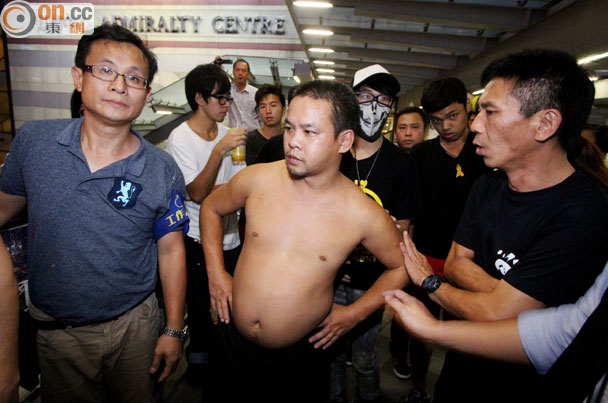

(SCMP)
Hong Kong's High Court orders protesters off roads in Mong Kok and Admiralty.
October 21, 2015.
The High Court yesterday ordered
pro-democracy protesters to leave main roads in Admiralty and Mong Kok
immediately, as top officials and student leaders prepared for tonight's
talks on political reform.
In response, one protester today said he
was applying for legal aid to allow lawyers to represent him as an
"interested party" in a fresh court hearing, in which he plans to argue the
injunction goes against Hongkongers' freedom of expression.
Ng Ting-pong, 38, who quit his job as a
waiter to spend the last 20 days at the Mong Kok protest site, was expecting
to learn by Wednesday whether his application was successful, according to
People's Power lawmaker Albert Chan Wai-yip who is aiding him.
The Court of First Instance yesterday
granted three injunctions - two for Mong Kok and one for Admiralty -
requiring the protesters to leave.
Granting the Mong Kok orders, Mr Justice
Jeremy Poon Shiu-chor agreed that "the defendants' behaviour in the
demonstration has caused obstruction … exceeding the boundary of what is
reasonable in light of the length of the demonstration, the extent of the
demonstration and the increasingly violent confrontation between the
protesters and the police."
The orders, for portions of Nathan Road
between Argyle Street and Dundas Street, and Argyle Street westbound between
Tung Choi Street and Portland Street, had been sought by taxi operators and
a minibus company.
The Admiralty injunction, sought by the
owners of Citic Tower, requires protesters to clear emergency vehicle exits
and the car park entrance of the building at the junction of Tim Mei Avenue
and Lung Wui Road, next to the government headquarters. Poon said: "The
court is not a forum where political views are vindicated or argued. The
court is only to apply the law and to uphold the rule of law."
(Apple
Daily) October 21, 2015.
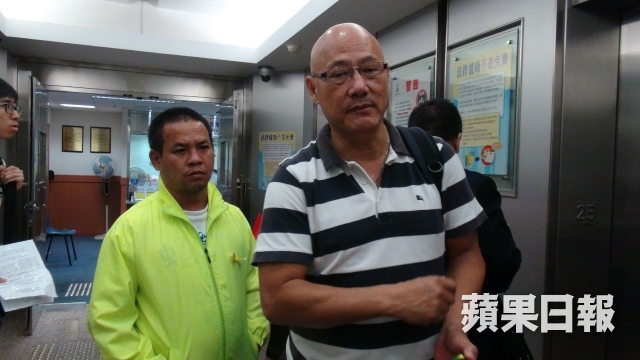
Appellant Ng Ting-pong and People Power
legislator Chan Wai-yip
Yesterday, legislator Chan Wai-yip
accompanied two citizens to apply for legal aid so that they can be attend
the court hearing as "interested persons" and ask the court to vacate
the injunctions.
(Apple
Daily) October 21, 2015.
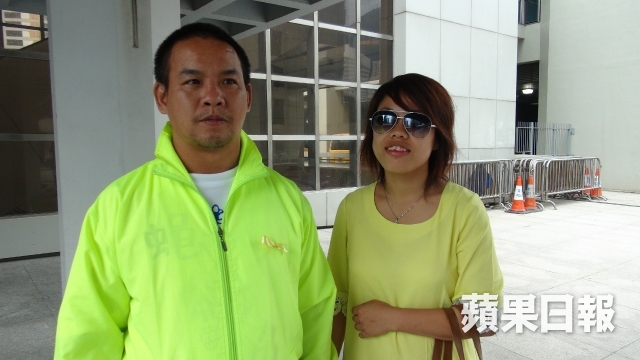
Appellant Ng Ting-pong said that he once
participated in the Homeless World Cup. He used to sleep in the streets in
Mong Kok. When Occupy Mong Kok began, he walked past one day and spotted a
friend. So he entered the area and sat down. When he heard that students
were beaten and sprayed with pepper spray, he decided to stay on as a
volunteer to protect the students. He thought that the injunction was
unreasonable and so he wanted it vacated.
High Court
Actions Number 2086 and 2104 of 2014:
Chiu Liuen Public Light Bus Company Limited
versus
1st defendant: persons unlawfully occupying or remaining on the public
highway namely, the westbound carriage of Argyle Street between the junction
of Tung Choi Street and Portland Street and/or other persons hindering or
preventing the passing or repassing of Argyle Street
2nd defendant: Ng Ting Pong
3rd defendant: Fok Wai Pong Dominic
4th defendant: Chen Raymond
Lai Hoi Ping (suing on his behalf and on
the behalf of all other members of Hong Kong Taxi Assocation)
Tam Chun-hung (suing on his behalf and on the behalf of all others members
of Taxi Drivers and Operators Association)
versus
1st defendant: persons occupying portions of Nathan Road near to and between
Argyle Street and Dundas Street to prevent or obstruct normal vehicular
traffic from passing and repassing the occupied areas
2nd defendant: Ng Ting Pong
3rd defendant: Fok Wai Pong Dominic
4th defendant: Chen Raymond
(SCMP)
Judge refuses to delay injunction that lets police help clear protestors.
November 14, 2015.
A High Court judge yesterday
refused to delay an injunction that will allow the police to assist bailiffs in
clearing Occupy protest areas in Mong Kok and even arrest people who obstruct
them.
Two defendants, Dominic Fok Wai-pong
and Ng Ting-pong, had filed applications to stay the court order, and also
asked for leave to appeal after Mr Justice Au Hing-cheung rejected their
application yesterday. The case will be heard in the Court of Appeal this
afternoon. The protesters' legal team argued that the judge's ruling had
been in error because he addressed the question of public order by way of
civil litigation, but not by the government itself. They also said the
drivers' group that applied for the injunction had failed to show they
suffered substantial losses beyond those of the rest of the public.
But Au found those grounds were not
arguable and refused to grant them leave to appeal. He told the lawyers for
the taxi and minibus drivers' group that he would hand down the order of
injunction no later than today.
Solicitor Maggie Chan Man-ki, for the
minibus drivers, said that once they had the order they would follow all
proper procedures, including publishing the terms of the order in newspapers
and putting it up at protest areas before taking action.
Barrister Margaret Ng, for the
protesters, complained that the court and plaintiffs had failed to inform
people in protest areas about the terms of the order since the judge handed
down the judgment on Monday. "The order will affect a lot of people in the
area. They have the right to know details of the court order and how it will
be carried out. Otherwise, it will be unfair," Ng said.
(SCMP)
Court dismisses Occupy bid to appeal Mong Kok clearance injunction. November
15, 2015.
Occupy Central was dealt a blow at the
Court of Appeal on Saturday when a protester lost a bid for leave to appeal
against an injunction which allows police to assist bailiffs to clear the
movement’s Mong Kok site. The two judges also refused Dominic Fok Wai-pong’s
request to stay the injunction. The court’s decision indicates that the
order to dismantle the barricades could go ahead at any time.
The order was obtained by taxi and minibus
drivers who claim their businesses are being affected by the protests, which
have blocked sections of Nathan Road and Argyle Street since the end of
September.
Solicitor Maggie Chan Man-ki, representing
the minibus drivers’ group, said they would proceed with the court order.
She said the group would place advertisements in one Chinese-language and
one English-language newspaper, and put notices up at the occupied area to
inform protesters about the order. They would then ask bailiffs to assist
them to enforce the order. Chan claimed that she still needed to discuss
with her clients about the content of the newspaper advertisements. She
refused to say when the clear-out action would take place.
However, as the taxi drivers’ group – which
also obtained a court order to clear the site – needs to amend some wording,
it is estimated that action could take place as early as next week. Fok
yesterday asked for leave to appeal the court order as he claimed the two
drivers’ groups failed to show they had sustained substantial enough damages
to ask for an injunction in a public area.
High Court Chief Judge Andrew Cheung
Kui-nung and Court of Appeal Vice-President Justice Johnson Lam Man-hon said
they found the trial judge was correct to rule that the road blockages in an
area “as busy and as central as Mong Kok” would cause the professional
drivers who earned their living from public transport services to suffer.
“We see no reasonable prospect of persuading the court on appeal to take any
view other than that there is a serious issue to be tried regarding the
plaintiffs’ actual and potential damage,” the judges wrote. They then
dismissed Fok’s application.
(YouTube
from Apple Daily) November 21, 2014.
2:32 (Ng) With respect to the clearance, we
have told our brothers. When the bailiffs come to clear the site, we will
let them. We will not fight with the police. Even though they can clear the
site, the movement will be carried on.
(SCMP)
Protester loses bid to appeal against injunction allowing police to aid
bailiffs. November 22, 2015.
Courts have the duty to protect the
constitutional rights of private citizens, two appeal judges have ruled in
upholding an injunction order that authorised bailiffs and the police to
help clear the protest area in Mong Kok.
High Court Chief Judge Mr Justice
Andrew Cheung Kui-nung and Court of Appeal vice-president Mr Justice Johnson
Lam Man-hon made the observation as they refused a protester leave to appeal
against the order. "We understand there are exceptional political
circumstances that gave rise to the unlawful occupation in the present
case," Mr Justice Lam wrote. "But the court has to be involved in this
instance because the rights of private citizens protected by the law are
said to be threatened and they seek redress."
Protester Ng Ting-pong, in seeking
leave to appeal and a stay of the order, had asked why the matter should be
dealt with by civil litigation rather than an action brought by the
secretary for justice.
Lam said the minibus drivers group
who obtained the injunction claiming their business had suffered from the
obstruction of Argyle Street had simply exercised their constitutional
right. "It is the duty of the court to adjudicate upon and, where justified,
give effect to such rights according to law," Lam wrote. "Even in cases
where protesters are pursuing a noble cause that they feel strongly about
(and we express no view on the protest in the case before us), this does not
give them any right in the eyes of law to trample upon the rights of the
others who may or may not agree with their cause. This is an important facet
of the rule of law which, as judges, we must uphold."
Lam also stated that the court would
not consider similar future applications for leave to appeal. He said that
the case involved exceptional circumstances because a large number of
protesters, with the encouragement of some public figures, had openly
disobeyed and flouted the injunction order. "If such an idea prevails, it
will bring society into disorder, chaos and lawlessness," he wrote.
The two appeal court judges backed Mr
Justice Thomas Au Hing-cheung's decision to allow the police to assist
bailiffs if necessary. They found that Au's order, issued on November 10,
did not compel the police to make any arrest but limited their action to
powers conferred on them by the law. They also found that Au had given clear
directions to the bailiffs and the police on how to carry out the order.
They believed that protection had been given to the defendants.
The minibus group's lawyer, Maggie
Chan Man-ki, said they would take clearance action as early as Monday but
that no timetable had been fixed.
Ng was disappointed with the
judgment. He said some protesters would stay until they were arrested and
that it would not be the end of their campaign.
(Oriental
Daily) November 23, 2015.
Our newspaper received a reader's tip
that the appellant against the Mong Kok court injunction Ng Ting-pong was a
triad gang member with an extended criminal record. Nicknamed "Capone", Ng
Ting-pong allegedly "spent more time in jail than outside." People Power
legislator Chan Wai-yip has accompanied Ng Ting-pong many times to
court. He said that he only knew Ng Ting-pong is known as "Ah Pong" and has
not heard of the nickname "Capone."
Chan is familiar with Ng's personal
past. He said that Ng told him that his father was a police officer, but he
himself joined a triad gang in his youth, has been caught many times and
gone to jail. "He broke down in tears as he told me." Chan believes that Ng
has reformed with the help of a social worker. Ng's participation in Occupy
Mong Kok and the appeal against the court injunction were spontaneous.
Chan also said that quite a few of
the Occupy Mong Kok individuals and volunteers are former triad gang
members. However, Chan emphasized that these people all joined Occupy Mong
Kok spontaneously and were not getting paid or ordered by gang
leaders to do so. Some of them told Chan that they have been violently dealt
with by the police before, and therefore they spontaneously occupied Mong
Kok to express their discontent after the police fired tear gas at
demonstrators in Admiralty. Chan wants citizens not to wear colored lens to
regard these reformed Occupy people.
(Oriental
Daily) May 5, 2015.
Yesterday the Court of Appeals ordered
Occupy Mong Kok participant Ng Ting-pong to pay the legal fees for the Chiu
Leun Public Light Bus Company and the other taxi associations. It is
estimated that the bill runs to over $100,000. Since Ng could not get legal
aid, he will have to foot the bill himself. Ng has been reported to be an
unemployed welfare recipient with a long prior criminal history.
According to People Power legislator Chan Wai-yip, "Heroes from various
sectors will help Ng raise the money."

(SCMP
with video) Occupy protesters fight with suspected undercover police officers:
one knocked out. December 1, 2014.
Violence erupted in Admiralty on Monday
morning following students’ attempts to storm government headquarters, with
at least one suspected undercover police officer rushed to hospital after he
was kicked and stomped on the ground by students. The chaotic brawl,
captured on camera by the South China Morning Post, began at around 9am, an
hour after police had repelled protesters’ attempts to storm government
headquarters with pepper spray and batons.
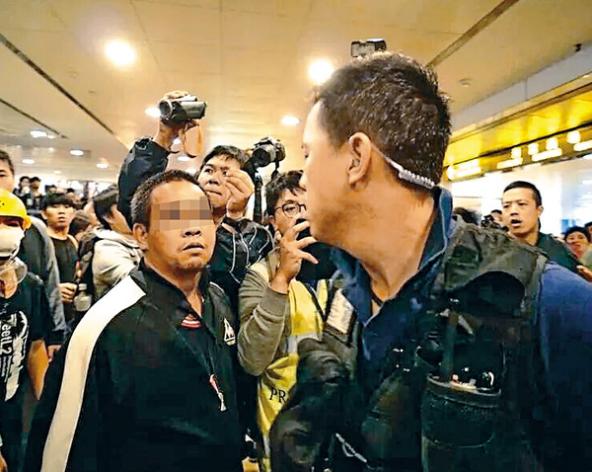
Ng Ting-pong faces off plainclothes policeman
in Admiralty Centre
(Neighborhood
Monitoring Team) December 13, 2014.
Occupy Mong Kok volunteer Ng Ting-pong
applied for legal aid to appeal the court injunction against Occupy Mong Kok.
He was found to have a long criminal record. On December 1, he was suspected
of assaulting three off-duty police officers. He fled during the confusion. On
the day before yesterday, the police found him while they were clearing
Admiralty. He is being charged with one count of assaulting a police
officer.
38-year-old Ng Ting-pong claimed to work at
a fast food restaurant and lives at 138 Castle Peak Road. According to
information, Ng has a triad record with prior convictions in burglary, theft
and operating a vice establishment.
(Oriental
Daily) May 19, 2014.
The unemployed welfare recipient Ng
Ting-pong was charged with four counts: three counts of attack on police
officers on duty, and one count of common attack. According to the testimony
of one police officer, he and two other plainclothes officers were going
off duty. They proceeded to the MTR station at Admiralty Centre. On the way,
they were cursed out in foul language and had objects tossed at them. The
police officer tried to stop the perpetrators, but he was pushed to the
ground and attacked by ten to twenty individuals. He recognized Ng as the
person who was sitting on his waist. He also testified that Ng punched him
on his chest.
The defense questioned whether Ng had
merely lost his balance, fell down on the ground and touched the police
officer accidentally.
(Apple
Daily) May 21, 2015.
Today the police officer named Chan was
accused by the defense of forcing Ng Ting-pong to take off his pants and
kneel down in the police station. Chan denied any such thing. The defense
then said that Chan threatened Ng: "If you make trouble at the medical
examination, I will use any of the Occupy Central cases to cause you more
trouble." Chan supposedly also reminded Ng not to tell legislator Chan Wai-yip
about this case. Chan denied any such thing.
Meanwhile another arresting officer named
Ng was accused by the defense of ignoring Ng's demand to speak to a
lawyer. Ng denied any such thing.
(Wen
Wei Po) June 4, 2015.
Yesterday around 3pm, the trial of Ng Ting
Pong was in the summation stage. The defendant Ng Ting Pong told the
magistrate that he was experiencing stomach problems and asked for a break.
At 420pm, Ng had not returned yet. The prosecutor reviewed the surveillance
video for the courthouse and found that Ng had left the building at 311pm.
The magistrate considered Ng to have willfully absented himself while being
fully aware of the consequences. Therefore the magistrate issued an arrest
warrant for Ng. Ng's lawyer asked to withdraw from the case, and the
magistrate approved his petition.
(Oriental
Daily) July 17, 2015.
Ng Ting Pong, nicknamed Capone, was charged
with assaulting three police officers at Admiralty Centre on December 1st
2014. The magistrate found Ng guilty of three charges of common assault, and
sentenced him to 10 months in jail. Previously, Ng had fled the court after
claiming to have stomach problems. He was arrested afterwards and sentenced
to 14 days on that count.

(New
People's Party) Between April 27 and May 8, a total of 2,773 street
interviews were help in 30 locations across Hong Kong. (Questionnaire/Data
tables)
Q1. How would you characterize
your position towards the proposal for the 2017 Chief Executive election?
53%: Support
17%: Oppose
30%: Half-half
Q2. Do you agree or disagree the
Legislative Council should pass the proposal which is based upon the Basic Law
and the National People's Congress Standing Committee's August 31st framework
and implement universal suffrage for the Chief Executive election in 2017?
51%: Agree
18%: Disagree
31%: Half-half
Q3. If the proposal can be
improved further after 2017, do you think the current proposal should be passed
now? (Base: Those who answered Disagree/half-half in Q2)
33%: Agree
26%: Disagree
41%: Half-half
Q4. If the Legislative Council
does not pass this proposal who do you think is responsible?
53%: Pan-democratic camp
10%: Pro-establishment camp
36%: The Hong Kong SAR government
5%: Others
Q5. If the constitutional reform
is stuck, what do you gets impacted most?
33%: People's livelihoods
32%: Governance
25%: Economic development
10%: Not much impact
Q6. If the proposal fails this
time, what do you think are the prospects for another effort?
41%: Pessimistic
48%: Half-half
11%: Optimistic
Q7. Gender
58%: Female
42%: Male
Q8. Age
5%: 18 or under
22%: 18-30
43%: 30-60
30%: 60 or over
Q9. Education
26%: Primary school or less
40%: Middle school
16%: Degree
16%: University graduate
2%: Graduate degree
(Oriental
Daily) May 27, 2015. The New People's Party poll was subjected to a
number of criticisms:
-- The interviewing was conducted by New People's Party workers, which may
generate selection bias
-- The 30 sampling locations were in Hong Kong Island and New Territories with
none in Kowloon, so these results do not represent the entire population
-- Street interviews are a form of convenience sampling, not random sampling.
This means that it is uncertain whether they can represent the entire
population.
-- The results were not weighted for demographic skews (such as there being too many women).
-- The blame question listed only the pan-democrats, pro-establishment and HKSAR
government, but not the central government.
(Apple
Daily) May 26, 2015.
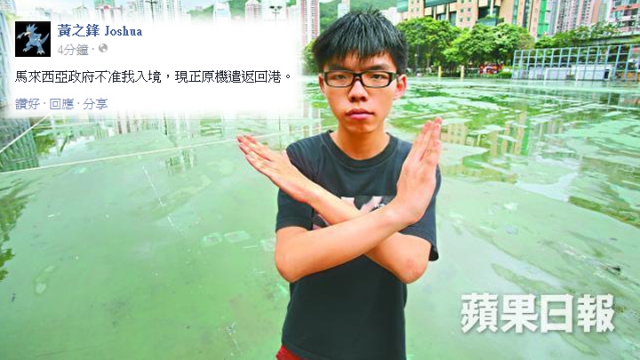
Joshua Wong's Facebook: "The Malaysian government
won't let me enter. I am returning to Hong Kong on the same plane."
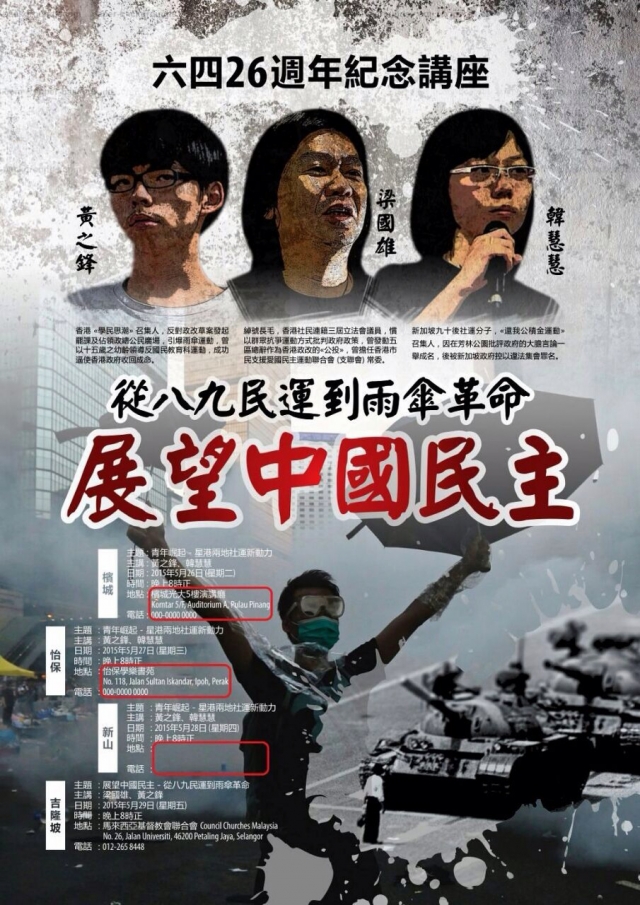
Poster for the event: "Looking forwards to
democracy in China: from the 1989 student movement to the Umbrella revolution"
with Joshua Wong, Leung Kwok-hung and Han Hui-hui.
(Wall
Street Journal blog) Hong Kong Student Activist Joshua Wong Barred from
Malaysia . May 26, 2015.
Joshua Wong, the teenage face of Hong
Kong’s pro-democracy student movement, was refused entry to Malaysia where
he was scheduled to attend a series of forums relating to the 1989 Tiananmen
Square crackdown.
Mr. Wong, 18, said in statements posted to
his social media accounts on Tuesday that he was banned from leaving
Malaysia’s Penang airport upon arrival because of a “government order,” he
cited an immigration official as saying. He was put on a Dragon Air flight
back to Hong Kong the same day.
The convener of student protest group
Scholarism was due to speak at a series of events organized by a group known
as the “Malaysian Working Group on the 26th Anniversary of June 4,” made up
of various Malaysian groups such as Perak Civic Group and the Penang Chinese
Media Journalist and Photographers Association. Mr. Wong was invited to
speak at events in Penang, Ipoh, Johor, Petaling Jaya and Kuala Lumpur
between May 27 and June 4, according to an itinerary posted on Facebook.
Mr. Wong was scheduled to speak alongside
Singapore activist and blogger Han Hui Hui on Tuesday night in Penang about
youth activism in Hong Kong and Singapore.
“Joshua Wong, 18, too dangerous to
step foot in Malaysia? Strange and embarrassing,” said Malaysian human rights
lawyer Michelle Yesudas in a tweet.
Malaysian immigration authorities didn’t
immediately respond to a request for comment.
Firebrand Hong Kong legislator Leung
Kwok-hung, known as Long Hair, is due to speak at an event in Kuala Lumpur
on Friday on China’s democratic development form 1989 to the Occupy
protests. Mr. Wong was also scheduled to address the event.
(SCMP)
May 15, 2015.
"Based on records available to me, the
named subject is listed as 'NTL' – not allowed to land. I am unable to
furnish any reason due to it being a confidential matter beyond my authority
to discern,” Wang Syaifuldin, immigration attaché of the Malaysian consulate
in Hong Kong told the South China Morning Post.
According to online news outlet
Malaysiakini, Malaysia’s Home Minister Ahmad Zahid Hamidi claimed to have no
knowledge that immigration had banned the 18-year-old activist from entering
the country. The minister explained that if immigration banned a foreign
citizen, particularly an activist from entering the country, it was mainly
for reasons of national security. When asked why Wong was detained at Penang
airport, he said he needed to speak with the director general of immigration
on that. Ahmad said the Malaysian government holds an open attitude to
differences of opinion and on the political ideology of activists. However,
if foreign activists or citizens could affect the country negatively, the
government would be stern on them, he said.
According to Wong’s Facebook page, he was
to attend a series of events co-organised by a non-government organisation
called the Working Committee for the 26th Anniversary Commemoration of June
4 Incident in Malaysia, and seven other local activist and youth groups.
He was scheduled to speak at a seminar on
social movements tonight in Penang, another similar forum in Ipoh tomorrow,
and give a talk with a Singaporean activist in Johor on Thursday.
Wong was also set to join lawmaker “Long
Hair” Leung Kwok-hung in Kuala Lumpur on Friday to give a talk on the
Tiananmen Square military crackdown and the Occupy movement.
Event organisers called the government’s
move "political suppression" and demanded it explain why Wong was refused
entry and whether it keeps a blacklist on immigration. "The committee was
waiting at Penang airport and approached the Immigration Department many
times, but we were not given a clear explanation," the group said. It is the
second year the group has organised a June 4 event, but the first time it
has invited foreigners to attend. The talks will be held as usual, the
organisers said.
(Agence
France Presse) Malaysia bars Hong Kong student leader for
'anti-China' views. May 26, 2015.
Malaysia's Inspector-General of Police Abu Bakar Khalid said the purpose of
Wong's visit was to explain how he had organised demonstrations in Hong
Kong. "We were afraid that what he was going to speak about would harm our
security," he told AFP. "He was also going to speak about China. We know his
anti-Chinese speeches. We do not want him to jeopardise our ties with
China," Khalid said.
Democracy activists reject Beijing's restrictions on a proposed public vote
for Hong Kong's leader in 2017, which stipulate that candidates must be
vetted by a loyalist committee.
Khalid
said Malaysian police had asked the immigration department to stop Wong
entering the country. "We do not need him in Malaysia as Wong is an
undesirable element," he said.
Wong
was sent back to Hong Kong on the same Dragonair flight on which he arrived.
On his return, he said officials in Malaysia had taken his passport and air
ticket for half an hour before telling him he must return to Hong Kong
"immediately".
"I
asked what's the reason? Were there any documents? And the representative
only said it was a government order," he said. "I asked if there was any
detailed information about the government order and they didn't want to
respond. They tried to grab my arms and take me away."
Wong
added: "I don't understand how there is any relation between the Umbrella
Movement and Malaysia's national security."
(Ministry
of Foreign Affairs of the People's Republic of China) Spokesperson Hua
Chunying's Regular Press Conferece on May 27, 2015.
Q: Joshua Wong, the convenor of the Hong Kong student activist
group "Scholarism" was denied entry into Malaysia. A Malaysian official said
yesterday that the order of rejection was issued because Wong's speech might
hurt Malaysia's ties with China. What is China's comment on that?
A: I have seen the report, but
I am not aware of the specifics. We respect Malaysia's exercise of entry and
exit administration in accordance with the law.
(Sky Post via
Speakout HK) By Chris Wat Wing-yin. May 28, 2015.
Scholarism convenor Joshua Wong
was refused entry into Malaysia and sent back to Hong Kong on the same plane.
Wong seemed surprised. "A country that was not affected by the Umbrella
Movement bars the Hong Kong student movement leader from entering." Wong said
in discontent.
I have said previously that the
Umbrella Movement is properly called the Umbrella Riots. Like the 1967 riots,
it was a painful period in the history of Hong Kong. When named this way, Wong
should understand why he is not welcomed in Malaysia. A riot leader should be
listed on the terrorist watch list. Malaysia, Macao and mainland China are
just the tip of the iceberg. More countries will kick him out.
Wong said: "Malaysia did not
act according to procedure. I feel deep regrets. I am every angry ..." From
another point of view, you should be happy about where you are. In Hong Kong,
everything is according to procedure. You occupy the roads, and they have to
follow procedures to remove you. You call people to attack government
facilities, you are arrested at the scene and they have to follow procedures
to prosecute you. By contrast, in Malaysia, they will just arrest you without
saying another word. Frankly, you know what you have done. Don't take other
people for fools. These are international standards.
Amazingly, Wong said: "The Hong
Kong Special Administrative Region government (especially the Security Bureau
and the Immigration Department) is obliged to respond and follow up on this
matter." A sovereign country has made a decision, and a small city cannot
insist on having a say. If you want to blame anyone, it is TIME magazine for
making you famous and almost inadmissible almost everywhere.
Besides, you wasted 79 days of
our lives, ripped our society apart and damaged our economy. By comparison, what
is so big deal about you not being able to travel?
(SCMP)
Hong Kong lawmaker 'Long Hair' denied entry to Malaysia to speak about Tiananmen
crackdown. May 29, 2015.
Pro-democracy lawmaker “Long Hair”
Leung Kwok-hung was denied entry to Malaysia today after arriving to attend a
forum in Kuala Lumpur to talk about the 1989 Tiananmen Square protests and
crackdown in China. Leung, through his party colleague Raphael Wong Ho-ming,
said he was detained and his travel document seized soon after he arrived in
Kuala Lumpur this afternoon. He urged Chief Secretary Carrie Lam Cheng
Yuet-ngor, Secretary for Security Lai Tung-kwok and Director of Immigration
Chan Kwok-ki to press the Malaysian authorities to allow him to enter the
country. Raphael Wong said Leung had been sent back on a flight to Hong Kong.
(News.gov.hk)
May 29, 2015.
Secretary for Security TK Lai says the
Government respects Malaysia's decision to refuse entry to legislator Leung
Kwok-hung. He made the statement today in response to a reporter's question,
adding the Government respects immigration decisions made by other
jurisdictions according to their laws. He said the Government will not
intervene in the issue.
(Channael
News Asia) November 29, 2017.
Activist Jolovan Wham Kwok Han was charged in
court on Wednesday (Nov 29) with organising public assemblies without a
permit, vandalism and refusing to sign his statement to police. On Nov 26 last
year, Wham allegedly organised an indoor public assembly without a permit. The
event was held at The Agora and featured Hong Kong activist Joshua Wong, who
gave a speech by real-time transmission.
Anyone found guilty of organising a public
assembly without a police permit can be fined up to S$5,000, while repeat
offenders can be fined up to S$10,000 and jailed for up to six months.
Internet comments:
- Favorite Hong Kong phrase:
Actress Jinny Ng feigning surprise: "How awesome! Why is it so?"

- 700 comments on this discussion
forum within 3 hours, most of them celebratory in nature. Joshua Wong must be
really unpopular around here.
- They shouldn't have sent him
back on the same Dragon Air flight. They should have put him on
Malaysian Airlines Flight 370 instead.
- Did he open a yellow umbrella as
soon as the airplane landed? Did they think that he was mentally unstable as a
result?
- When Joshua Wong comes back to
Hong Kong, he is going to lead his 50 Scholarism lackeys to occupy the Malaysian
consulate in Hong Kong, and teach them about freedom/democracy/human rights/rule
of law/universal values.
- The Malaysian consulate is Malaysian territory.
This would be an invasion of foreign territory.
- The Malaysian government must be
afraid that Joshua Wong would go there and teach their people all about ...
the hunger strike!
-
Immigration Department of Malaysia: Prohibited Immigrant
3. The
following persons are classified as prohibited immigrants :
i.
Anyone who believes in or advocates the overthrow of any government,
constituted law or authority in Malaysia by force or violence or who
disbelieves in or is opposed to the established government, or who
advocates the assassination of public officials, or who advocates or
teaches the unlawful destruction of property;
j.
Anyone who is a member of or is affiliated with any organisation that
entertains or teaches disbelief in or opposition to the established
government or advocates or teaches the need for unlawful assaulting or
killing of any official, specific or general, or of any government in
Malaysia or any established government or advocates or teaches the
unlawful destruction of property.
k.
Anyone who as a result of reliable unfavourable information received from
any source, from any government, through official or diplomatic channels,
is deemed by the Minister to be an undesirable immigrant;
- (Malay
Mail Online) Joshua Wong called his Malaysian contact Richard Chin, who
has a recorded telephone conversation as Wong was being escorted to Dragon Air
flight KA 634. Wong can be heard saying that he was being escorted to the flight
by several immigration officers. "They told me I have to go back, they're
dragging me along." Wong paused to yell to his handlers: "Don't use violence,
I'm talking to my friend here." He continued: "What can I do now? They are quite
firm about getting me on the flight back." Chin then advised Wong to do as the
authorities said for his own safety.
- Which leaves the big question unanswered: Did the Malaysian immigration
officers squeeze his testicles?" (see
GameFAQs)
- Don't worry about whether Joshua
Wong can afford the airplane tickets (including the return flight). His
organization Scholarism has millions of dollars squirreled away and his mother
is the Treasurer.
- The
Malaysian executive power is vested in the cabinet led by the prime
minister; the Malaysian constitution stipulates that the prime minister must be
a member of the Lower House of parliament who, in the opinion of the
Yang di-Pertuan Agong (YDPA), commands a majority in parliament. The
cabinet is chosen from among members of both houses of Parliament and is
responsible to that body. The Executive branch of the government consists of the
Prime Minister as the head of the government, followed by the various ministers
of the Cabinet.
In other words, Malaysia is not a democracy that adheres to
international standards of universal suffrage. In so doing, Malaysia joins other
rogue countries such as the United States, the
United Kingdom, France, Germany, Australia, New Zealand, Canada, South Africa,
Brazil, etc.
- A bunch of Hong Kong
pan-democratic legislators will probably demand the Malaysian government to
explain. Following international standards, the Malaysian government will invoke
either "executive privilege" and/or "national security."
- The Malaysian government won't respond to Hong Kong legislators because they
aren't at the same level. The Malaysian government won't even respond to the
Hong Kong Chief Executive because they aren't at the same level, as Malaysia is
a country and Hong
Kong is only one region within a country. The Malaysian will respond seriously to China because
China is the other superpower of the world.
- Unlike the United States, China
is not in the habit of telling other countries what they must do and what they
must not do.
- Malaysia does not observe
international standards because their police use
tear gas against civilians. Photo taken in
Kuala Lumpur, July 9, 2011. In do doing, they join other rogue countries such
as the United States, the United Kingdom, France, Germany, Australia, Canada,
Israel, Brazil, Chile, Turkey, etc.
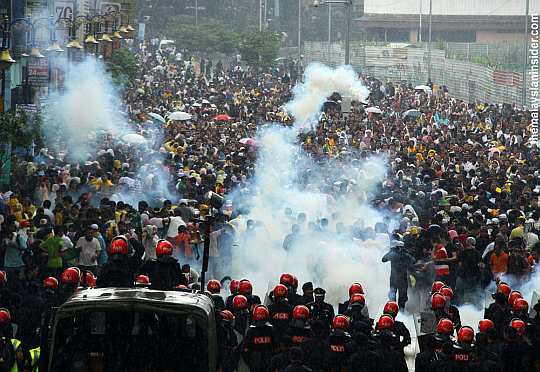
- What are the odds of Joshua Wong
making it into Singapore?
- This is the 26th anniversary of
the 1989 June 4th Tiananmen Square incident in which thousands of students were
massacred. Joshua Wong is 18 years old now. Do we need Wong to lecture us about
the history and legacy of June 4th 1989?
- More likely, Joshua Wong was asked to come and teach Malaysians about how to
Occupy the
Petronas Twin Towers.
- Channel News Asia
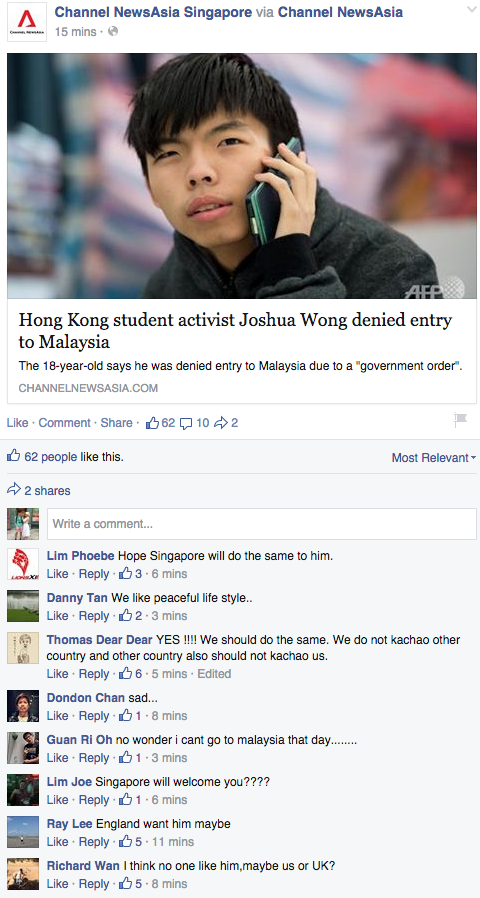
- (Ming
Pao) Hong Kong legislator "Long Hair" Leung Kwok-hung is about to go to
Malaysia to attend the same conference on Friday. Leung said that since he is a
Hong Kong Legislator Councilor, the Chinese government and the Hong Kong SAR
government must make sure that he can enter Malaysia. He also said that if he is
refused entry, then Hong Kong must not allow any Malaysia parliamentarians to
come to Hong Kong.
- Well, Leung is going there to teach the locals there how to occupy Kuala
Lumpur. Meanwhile the Malaysian parliamentarians are probably coming to Hong
Kong for sightseeing and shopping. Leung can't see the difference. Can you?
- Two months ago, China refused to let several British Members of Parliament to
come to Hong Kong to investigate the state of democracy there. By Leung Kwok-hung's
logic, the United Kingdom must refuse entry to all Hong Kong Legislative
Councilors (including Leung Kwok-hung).
- Leung Kwok-hung has multiple convictions on crimes related to demonstrations.
Is it so unusual for a country to reject a convicted criminal from entering?
- When they need you, they call
you "Police Uncle". When they don't need you, they call you "Police Dog." When
they need help, they call the Chinese consulate. When they don't need help, they
chant "Death to the Communists!" In like manner, when Leung Kwok-hung needed
Carrie Lam, he called her "Chief Secretary." When Leung Kwok-hung did not need
Carrie Lam, he disrupted the student debate competition which she attended.
(Sing
Tao) May 25, 2015.
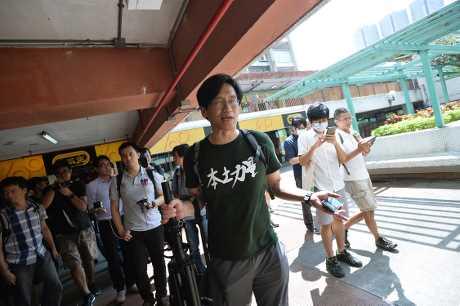
The Valiant Front issued a call to
demonstrate at 230pm in front of the Shun Li Estate office to protest against
the presence of the illegal immigrant Siu
Yau-wai. But by 230pm, nobody showed up except Mr. Ho (he wouldn't give
his full name) and two others from Hong Kong Localism Power which had
demonstrated previously at the Confucian Tai Shing Primary School. When Mr. Ho
saw nobody else, he told the horde of reporters that he did not issue the call
but he was merely responding to the call by others. He then left without doing
anything. The several masked men behind him also jumped onto a bus suddenly
and left.
(Oriental
Daily) May 25, 2015.
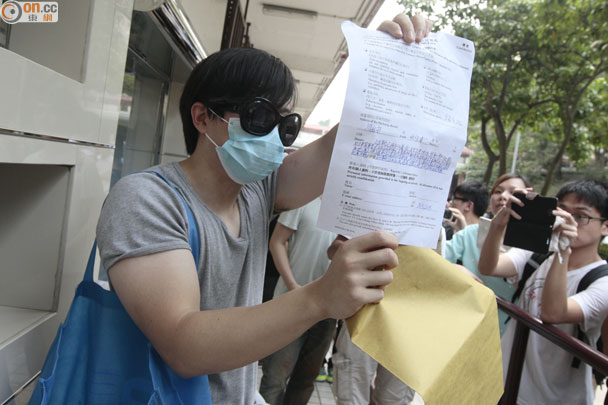
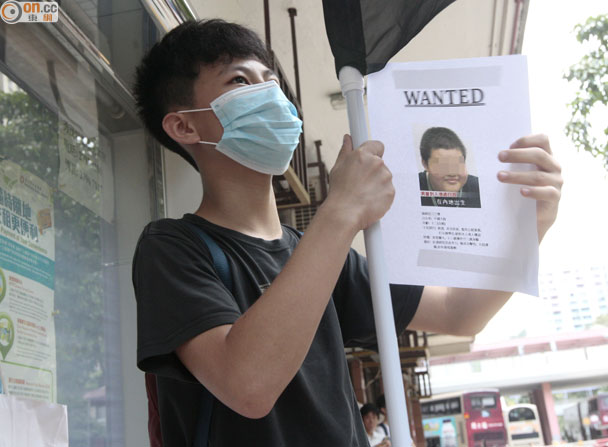
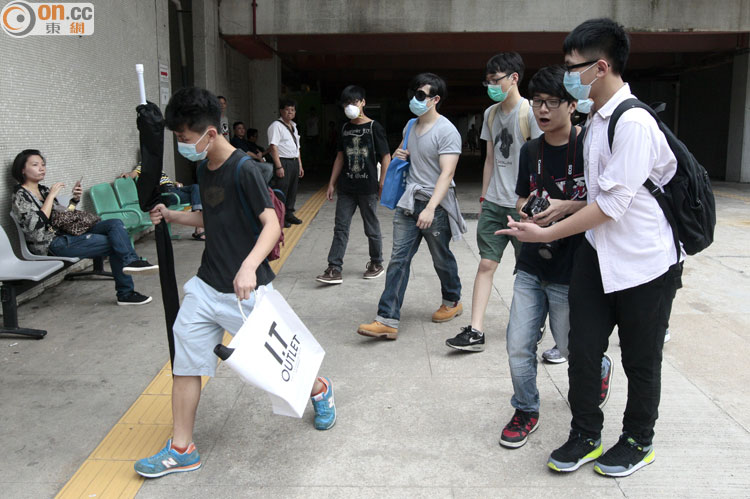
At 3pm, the event organizer
Valiant Front did not show up yet. Instead, Hong Kong Localism Power
spokesperson Mr. Ho and several other Internet users came. Ho emphasized that he
was a supporter but not the event organizer. He wanted to go to the Housing
Department to demand to know whether the resident was filing false information.
However, the Housing Department was closed on this public holiday (Buddha's
Birthday).
Mr. Ho and several Internet users
wanted to visit Grandma Chow in Shun Lee Estate in order to pay respect to the
senior citizen. But since fewer than 10 Internet users showed up, the event was
canceled and the group dispersed within 10 minutes.
The Valiant Front people showed up
30 minutes after Mr. Ho and company left. They were fewer than ten in number,
some of them wearing surgical masks. They stuffed two letters into the Housing
Department mailbox. One of the was a form denouncing abuse of public housing
services (specifically, sheltering an illegal immigrant). Another letter says
"WANTED" in English and has the photo and particulars of Siu Yau-wai. They left
after a short while. They declined to be interviewed. Some of them even used
cameras to film the reporters.
(Ming
Pao) May 25, 2015.
About ten teenage males came
around 3pm. They said that they came on their own. But the masked man
responsible for posting the letter said: "Can I not speak? I am afraid that I
will be identified." Then someone else told him not to be interviewed, and they
left in a hurry.
(Oriental
Daily) May 25, 2015.
The group Youngspiration
passed out flyers in Causeway Bay to oppose illegal immigrants. Later, they
joined with other groups such as Hong Kong Indigenous Front to march to the
Wanchai Immigration Department to petition the government to handle the case in
accordance with the law. About 100 people were in the march.
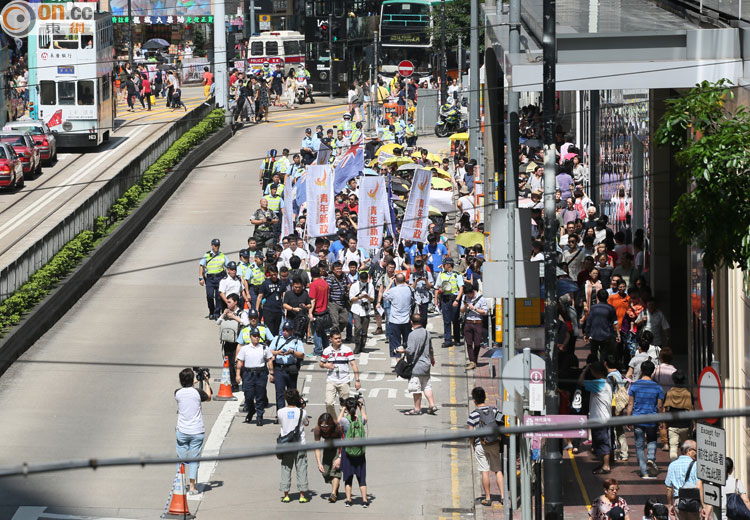
Captain America showed up and
waved the British Dragon/Lion flag for Hong Kong independence.
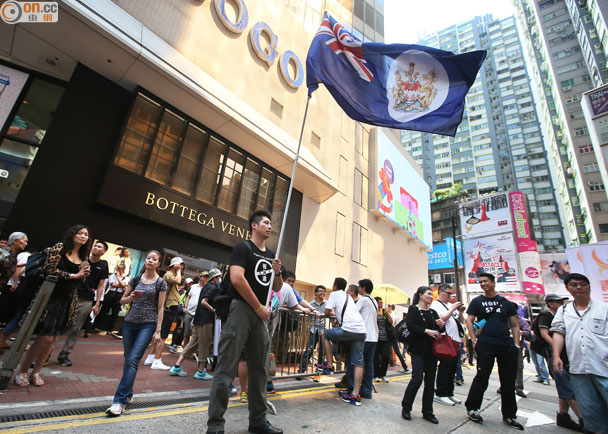
(Oriental
Daily) May 25, 2015.
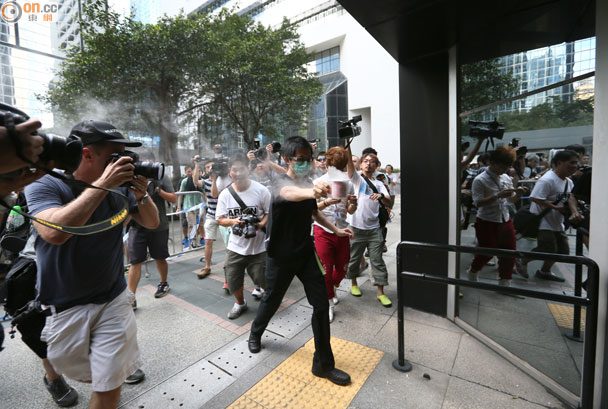
When the several dozen members of
Youngspiration, Hong Kong Indigenous and North East Parallel
Import Concern Group arrived to the open space outside the Immigration
Department building, they found the building closed because it was a public
holiday. So they posted their declaration outside the building. They also
released pesticide spray.
Hong Kong Indigenous spokesperson Ray Wong said that the Immigration Department should protect
Hong Kong against low-quality immigrants. When the Immigration Department fails,
their group will stop these low-quality immigrants with their own methods in
order to preserve the dignity of Hong Kong. Whether that means violent force or
not
depends on the situation.
North East Parallel Import Concern
Group spokesperson Leung Kam-shing gave the Immigration Department 28 days to
deliver. On June 18, the Immigration Department must send Siu Yau-wai back to
mainland China, or else he will take action himself.
Youngspiration convener Baggio
Leung Chung-hang said that it was inappropriate for Siu Yau-wai to receive
temporary residence papers so quickly. He said that this precedent-setting case
will cause a boom of Three No's immigrants. He said that the Federation of Trade
Unions which aided Siu here will pay a price in the District Council and
Legislative Council elections (see
EJinsight on Youngspiration's aspirations in those elections).
Videos:
(SocREC)
https://www.youtube.com/watch?v=rMsscnhhHls
(SocREC)
https://www.youtube.com/watch?v=OALRK7kvmF8
Internet comments:
- The people of Hong Kong have
articulated their rage. The Hong Kong government had better listen closely to
what they say and act accordingly. This is democracy at work.
- Yes, the people of Hong Kong. All 100 of them. (Actually, there were three
members of Hong Kong Localism Power at Shun Lee Estate, another seven members
of Valiant Front later at Shun Lee Estate and fewer than 100 at the Causeway
Bay-to-Wanchai march).
- Inconveniently for Hong Kong
Localism Power's Mr. Ho (no full name, please), there were no little girls to
bully today. Otherwise he will be invited for another round of radio talk shows
to justify himself.
- Which genius came up with the
idea of staging a media circus by presenting petitions to government departments
which are closed on this public holiday? Maybe they are all on the dole so that
every day is a holiday for them, while the rest of us work to support them.
- The Indigenous Valiant warriors
criticize the Leftards (=leftist retards) for formalism ("excessive adherence to
prescribed form") -- that is, the leftards' idea of revolution is to go on a
demonstration march on a public holiday (e.g. July 1st, New Years Day), deliver
some speeches (e.g.
Teng Biao
on June 4th 2014), show some videos (e.g.
June 4th
2014), sing some songs (e.g.
June 4th
2012), chant some slogans (e.g.
"Strike the Communists
down!") and disband afterwards filled with good feelings even though absolutely
nothing was accomplished. These Indigenous Valiant warriors didn't do anything
different today.
- The Indigenous Valiant warriors chanted "Down with the Communists" many times.
I don't see the Communists going down as a result of the incantations, do you?
- The Valiant Front guy in the
grey t-shirt wearing sunglasses looks so funny! Here are some conjectures:
(1) He just came out of the courthouse after being charged with sexual
molestation of minors
(2) He was getting prepared to ward off the tiger mosquitoes which causes dengue
fever
(3) A Ray Charles imitator with a case of severe flu

- They used a flea fogger? That
derives straight from Nazi
propaganda:
The Nazi regime gained control of
the printing industry under the Reich and used carefully crafted language in
order to convince millions to follow its vision of anti-Semitism. While doing
this, the Germans also sought ways to enhance its image in America, even going
as far as hiring American public relations firms to assist them. At the
forefront of Nazi hatred was anti-Jewish propaganda. The Nazis used pre-existing
stereotypes to portray Jews as bacteria that fed off the host nation, poisoned
its culture, seized its economy, and enslaved its workers. Other pre-existing
images of ‘the Jew’ included parasites, leeches, devils, rats, bacilli, locusts,
vermin, spiders, blood-suckers, lice, and poisonous worms, among many other
un-human descriptions.
The Nazis used the cyanide-based
pesticide
Zyklon B to murder millions of people who were "biologically inferior"
and could never be educated or elevated through Germanization.
The decision by the Hong Kong
Indigenous Democratic Front to use pesticide was most likely not made with the
Nazi past in mind. Instead, it was most likely a decision based upon the
collective unconscious, which are structures of the unconscious mind
which are shared among beings of the same species.
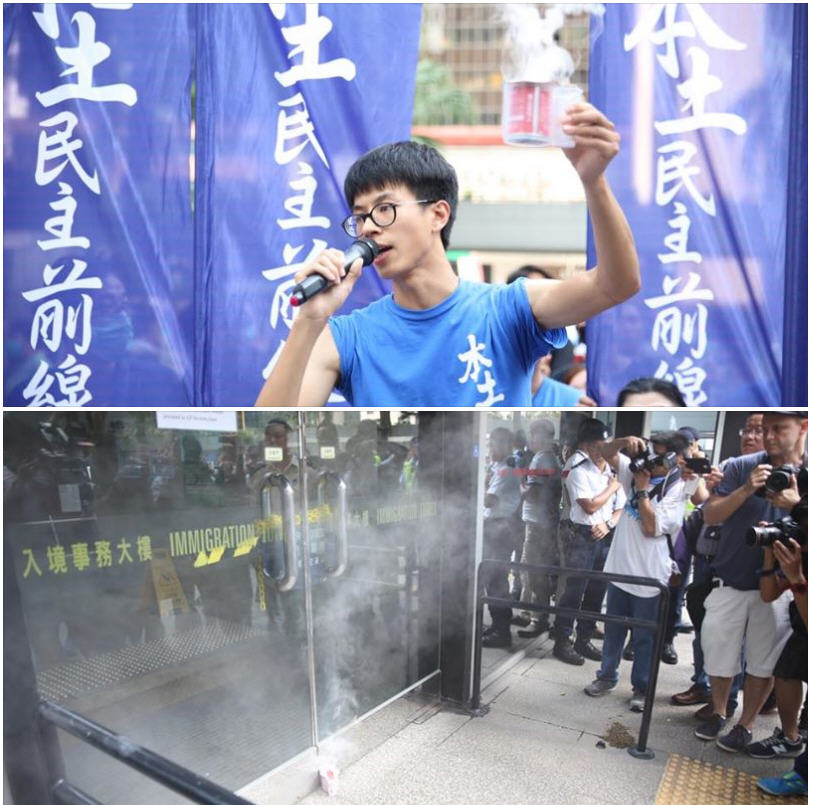
- Theories of racial
superiority are usually based on arguments about heredity and environment.
The majority of the Hongkongers come from the same genetic pool as the
mainland Chinese population, so there is no powerful argument to say that
the Hongkongers are genetically superior. This leaves only the environmental
argument (e.g. Hong Kong has good water; Hong Kong is not polluted like the mainland; Hong Kong has
rule of law; Hong Kong has good feng shui; Hong Kong has a better educational system; Hongkonger don't
defecate in the streets; etc). But if the mainland continues to improve in
environmental protection, healthcare, education, law, etc, that argument
will become weaker.
- Unfortunately or fortunately, Hongkongers know that they cannot invoke a
theory of Nietzschean
Übermensch for themselves, because that would only make them a
laughing stock in the world.
- Here is how the numbers get
played.
Suppose all you have is 50 core loyalists.
If you go out and call for a demonstration, people will see that your
organization only has 50 people. That is not very impressive in a population of
7.3 million, even (or worse so) if you keep re-iterating that you represent the
people of Hong Kong.
What can you do?
You go out and invent a number of different organizations with names such as
Hong Kong Indigenous, Hong Kong Indigenous Force, Hong Kong Indigenous Front,
Hong Kong Indigenous Democratic Front, Valiant Front, North East Parallel
Imports Concern Group, Tuen Mun People for Tuen Mun Affairs, Hung Hom People for
Hung Hom Affairs, Tai Po People of Tai Po Affairs, Sha Tin People for Sha Tin
Affairs, Youngspiration, Chinese University Indigenous Study
Group, UST Progressive, etc.
Now one organization calls for a demonstration, and 50 people show up.
A different organization calls for another demonstration, and 50 people show up.
All of a sudden, an illusion is created that there are many groups of different
people out there.
In fact, there are only 50 people all along, each of them belonging to 50
organizations.
(Cable
News,
Wen Wei Po) May 25, 2015. The DAB party commissioned the Hong Kong
Policy Research Institute to interview 1,070 persons by telephone on May 13-18.
Q1. Do you think that the
Legislative Council should pass the 2017 Chief Executive election proposal?
62%: Yes
32%: No
Q2. If the process is to pass the
proposal first and introduce improvements later on, what then?
62%: Yes unconditionally
4%: Yes conditionally
27%: No
Q3. If the proposal is vetoed,
what do you think are the prospects for universal suffrage?
62%: Pessimistic
27%: Optimistic
(Oriental
Daily) May 24, 2015.
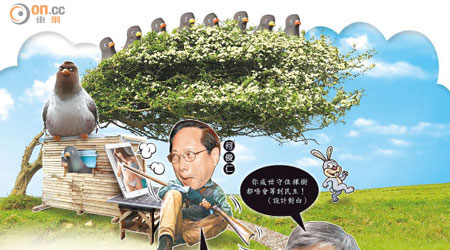
The Democratic Party is deeply divided over the constitutional reform. In January, veteran member Tik Chi-yuen
said on radio that the pan-democrats should seriously consider the public
opinion on "pocketing it first." The Democratic Party then expressed profound
regret over Tik's remarks which do not represent the party's position. Another
veteran member Lee Wing-tat accused Tik of angling for a government job.
More recently, another veteran
member Nelson Wong Sing-chi wanted to start a signature campaign for "pocketing
it first" under certain conditions. The Democratic Party froze his membership.
Yesterday, veteran member Law Chi-kwong
said on radio that the political issues are clearly affecting the economy and
people's livelihood. Therefore it is worrisome if the 2017 Chief Executive
election method stays the same. He said that there no solution that is zero-risk
for the central government while still being acceptable to the pan-democrats.
But if we stay at the same place, then the prospects become even more desperate.
The world will change, Hong Kong and China will change, but we cannot "sit at
the tree and wait for the rabbit." Therefore, Law called for a third solution
that is acceptable to the majority of the Hong Kong people while still being
acceptable to the central government and the pan-democrats.
Given that the Democratic Party
has shut down dissenting voices in the past, Law said that he is looking for
trouble for himself by saying so. He knows that he is just picking up a brick and dropping
it on his own foot. But he is fully prepared to deal the consequences.
What is "sit at the tree and wait
for the rabbit"?
(Hujiang)
In the Spring and Autumn Period
(772 to 446 BC), there was a farmer in the State of Song. In his field there was
a tree stump and one day while he was working in the field, he saw a rabbit bump
into the stump accidentally, broke its neck and died. The farmer was
overjoyed at the unexpected gain. He thought, "How wonderful! Game comes by so
easily! I'm tired of farming under the hot sun. I can make money from selling
the rabbits."
Therefore the farmer threw his hoe
back into the storeroom and sat beside the stump, indulging himself in the fantasy
that other rabbits would come along and do the same thing. He waited and waited
but no more rabbit came by. Many days passed before the farmer thought of his
field again, by which time the field was overgrown with weeds.
YouTube cartoon:
https://www.youtube.com/watch?v=_foxU9VBusQ
The government has made a proposal
on reforming the Chief Executive election in 2017. The Legislative Council will
vote on whether to pass the proposal or not. The pan-democrats hold 27 out of 70
seats in the Legislative Council. A two-thirds majority is required to pass an
amendment to the Basic Law. If the pan-democrats votes against the proposal, it
will not pass. If it is not passed, the Chief Executive will continue to be
elected by a 1,200-person election committee in 2017. The government is calling
the two choices: "pocket it first" versus "remain in the same spot."
The pan-democrats promise to take
a united stand and veto the proposal. That's fine. They can do that. They don't
even have to explain why "remain in the same spot" is better than "pocket it
first." But they owe the people an explanation about how democracy will come
about after their veto?
At the moment, the talk is about
how a rejection of the proposal will make the central government come to the
table with the only proposal acceptable the pan-democrats (namely, civil
nomination). This is like the farmer waiting at the tree stump -- if you wait,
the rabbit will come. The farmer is completely oblivious to the behavioral
patterns and psychological motives of rabbits. Rabbits don't have a history of
running into tree stumps (or else they would have been extinct according to Darwinian
natural selection)
nor are they psychologically motivated to satisfy the needs of the lazy farmer.
The central government is not known to make many concessions nor are they
psychologically motivated to appease the pan-democrats. They are satisfied with
continuing with the old Chief Executive election method indefinitely.
Which brings us to the matter of
dog biscuits. This goes back to the year 2004.
(SCMP)
His tails between his legs, Raymond Wu apologises for calling Hongkongers dogs.
February 20, 2004.
A Hong Kong deputy to the National People's
Congress yesterday apologised for his 'inappropriate' remarks that Hong Kong
people were like dogs that had been fed too many biscuits. Raymond Wu
Wai-yung was trying to illustrate his point that Hong Kong people had lost
their fighting spirit because the government had made concessions to people
who took to the streets. But he admitted yesterday that he might have
offended many members of the public.
Dr Wu, who is also a Hong Kong member of
the Basic Law Committee, was speaking at a forum on constitutional
development on Wednesday when he said the nature of people was similar to
that of dogs, which could be trained to respond to a particular stimulus.
'A dog jumps higher because it knows it can
get a biscuit by doing so,' he said. 'Hong Kong people have lost their
fighting and entrepreneurial spirit. It's because they have been fed too
many dog biscuits.' After bowing twice while apologising yesterday, Dr Wu
said he had failed to keep in mind the fact that dogs have negative
connotations in Chinese culture.
Activists belonging to the Anti-Tung
Solidarity group, including Leung Kwok-hung, presented Dr Wu with a bag of
dog biscuits and plastic bones outside the Miramar hotel where he held the
press conference.
The relationship between rabbits and dog
biscuits can be made clear through
Classical Conditioning.
There are many methods of classical
conditioning. The best known form is forward conditioning. In experiments,
Pavlov rang a bell and then gave the dog food. After a few repetitions, the
dog began to salivate to the bell even before the food appears. Pavlov called the bell the conditioned
stimulus (CS) because its effects depend on its association with food. He
called the food the unconditioned stimulus (US) because its effects did not
depend on previous experience. During forward conditioning, the onset of CS
precedes the onset of US in order signal that the US will follow.
In Raymond Wu's analogy, he was probably
thinking about the government as the human experimenter and certain people as
dogs. Through previous sessions, the human experimenter has rewarded the dog
with a biscuit whenever it jumps up. Therefore, the dog knows that if it wants
a biscuit, all it has to do is to jump high. So if the treasury runs a
surplus, you praise the government and you expect to receive a handout.
This is 2015. The roles are completely
reversed. The Yellow Ribbons are the human experimenters and the government is
the dog. Through previous sessions, the human experimenter has shown that
whenever they are unhappy with something or the other, they will be
obstructive/destructive (through non-violent marches/demonstrations, violent
marches/demonstrations, Occupy tactics, Shopping Revolution, Legco
filibustering, etc). When the government accedes to their demands, they will
stop those actions for the moment (that is, reward the government with a biscuit) until the
next issue pops up.
With a roll of successful cases (such as the
resignation of Chief Executive Tung Chee-wah after the 2004 July 1st march;
the cessation of unlimited visits from Shenzhen residents after the Sheung
Shui/Sha Tin/Tuen Mun/Yuen Long/Tai Po clashes; etc), the human experimenter has
every confidence that this trick will continue to work.
That was until they come across a dog that is
of a bigger and different species. This dog is much bigger than the human
experimenter himself, so threatening to beat the dog up is a laughable notion.
This dog is 10 meters tall and weights 5,000 kilograms. It has no interest in
the one biscuit that the human experimenter is dangling because it cannot
remotely satiate it. So how do you make this dog jump?
See
Vox: Hong Kong used to be 18 percent of China's GDP. Now it's 3 percent
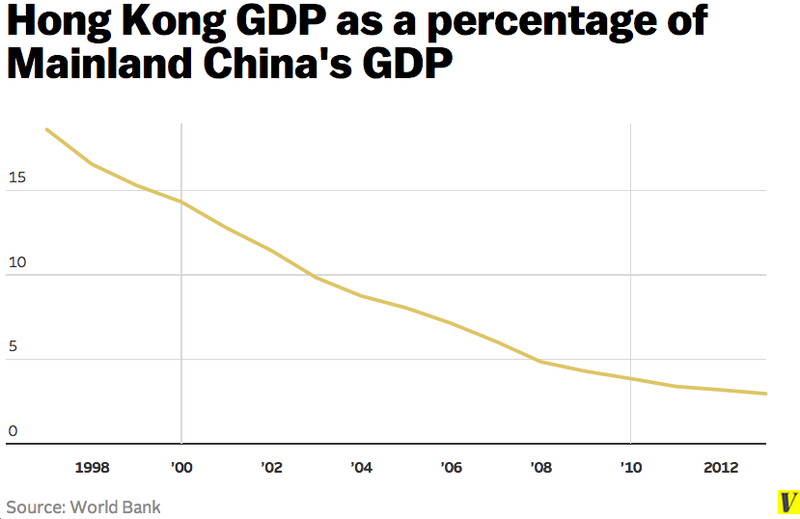
What can Hong Kong threaten the world's other superpower with?
P.S. There is another Chinese saying about
the standard tactics that a wife uses to get her way:
一哭二鬧三上吊.
First, you try weeping. Second, you try screaming and yelling. Third, you try
threatening to commit suicide by hanging. The saying does not explain what happens if
these tactics don't work. The answer is obvious: She goes to sleep and wakes
up the next morning acting as if nothing happened last night. Then she repeats
the same sequence in the vain hope that the outcome will somehow be different this
time. But it won't be.
(EJinsight)
Woman charged over undocumented mainland boy. May 22, 2015.
A
67-year-old woman has been released on bail after a young mainland boy was
found living in Hong Kong for nine years without identity documents. The
woman, surnamed Chow, has been charged with inducing others to breach
immigration rules, Ming Pao Daily reported Friday. Siu Yau-wai, 12, has
been issued a temporary residence permit by immigration authorities. Siu was
abandoned by his parents in 2006 when he was three years old, the report
said.
Chow said she found Siu without a Chinese
household registration certificate and arranged for him to come to Hong Kong
to live with her, using documents obtained from a third party. She claimed
Siu is her grandson. Chow surrendered to the police after seeking help from
trade unionist Chan Yuen-han, fearing the child will be left with no one to
care for him when she dies.
She came to Hong Kong 20 years ago.
Legal
experts said the Immigration Department has discretion to offer Siu right of
abode. However, they said it must first investigate the matter to avoid
setting a bad precedent.
Immigration sources said DNA tests could be arranged to verify the
biological relationship between Chow and Siu. A spokesman said any
investigation will take several other factors into consideration.
Details
of the case will also have to be passed to mainland authorities, he said.
On Tuesday, Siu gave short answers during a
press conference. He said he
mainly stayed home and was taught by Chow how to write. He
would hide in a washroom at the sight of a policeman.
Chow said the recent death of a teenage
girl who was found to have no identity documents prompted her not to dwell
on Siu’s situation. She said she is prepared to face the legal consequences
of her actions.
Chan urged immigration authorities to
wisely use their discretion, calling the plight of the woman and the boy a
tragedy.
(SCMP)
Abandoned boy, 12, divides opinion in bid for Hong Kong residency. May 23, 2015.
Hongkongers are split over the fate of a
12-year-old boy who has lived in their midst without official identification
for nine years, with some calling for him to be allowed to stay for
humanitarian reasons and others fearing the case may open the floodgates.
NGOs say they have indeed seen more children in similar situations.
In the spotlight is Siu Yau-wai, who at age
three was brought to Hong Kong by his grandmother Chow Siu-shuen from
Shenzhen in 2006 using a two-way permit, allowing only a short visit, after
his parents abandoned him on the mainland.
"There needs to be an investigation into
whether his claims are real and honest. If they are, [the government] should
not deport him," Billy Wong Wai-yuk, executive secretary of the Committee of
Children's Rights, said yesterday. "We signed the [UN] Convention on the
Rights of the Child … We should view this from the child's standpoint and
decide what is best for him."
Wong noted Yau-wai had nowhere to "return
to", contrary to callers on a phone-in morning radio show who expressed
fears allowing him to remain would encourage an influx of illegal migrants
and overstayers.
The boy was given temporary papers on
Thursday after going with his grandmother, 67, to the Immigration Department
to turn themselves in. As of late last night, 56 per cent of respondents to
an SCMP.com poll agreed with the department's decision.
(The
Standard) Fate of illegally hidden boy in balance. May 22, 2015.
A 67-year-old
grandmother was arrested yesterday when she turned herself in, saying she
had illegally hidden her 12-year-old mainland- born grandson for nine years
in Hong Kong.
A tearful Chow Siu-chuen said Siu Yau-wai
was abandoned by his parents in Shenzhen shortly after his birth because
they considered him bad luck. The boy has no Hong Kong identity card and has
never been to school.
The case echoes that of an undocumented
15-year-old girl who plunged to her death from the family's Repulse Bay flat
last month. The girl, as well as her 14-year-old sister, did not have a
birth certificate or a Hong Kong ID card, and had never been to school.
Chow said her grandson was placed in a
cardboard box and left on a street after the mother was diagnosed with
breast cancer and the father was injured in an industrial accident. She said
she "didn't have the heart" to let that happen so "I hired a woman to take
care of him."
The woman backed out later on "so I took
him here," Chow said. "I didn't want to leave him there alone. I didn't want
him to die." She said she borrowed someone's hukou household registration
permit to apply for a two-way permit. She said the boy is stateless, with no
legal rights nor protection, as his birth was not registered in either the
mainland or Hong Kong.
Chow added that for the past nine years, he
had no formal education, nor could he see a doctor when he was sick, except
for practitioners of Chinese medicine, which usually does not require
identity documents.
At a press conference, Chow recalled the
boy saying: "Grandma, I'd die with you if you pass away. I can't be of any
use anyway. I don't have an identity. Even if others bully me, I can't tell
anyone." The boy added: "I have to hide whenever I see the police. I'm
afraid my grandmother and I would be arrested."
Later, the pair went to the Immigration
Department office, where the boy was granted recognizance while the
grandmother was arrested for aiding and abetting breach of condition of
stay. She was later released. The case will be handled by the Investigation
Division.
Federation of Trade Unions lawmaker Chan
Yuen-han and Lau Kar- wah, a lawyer, are helping the pair. Lau said the boy
may be deported but he hopes the government will let him stay. "This is a
very special case, given that he has nobody to take care of him in the
mainland," he said. Lau added that Chow turned herself in "because it is in
the best interest of the boy."
The boy said he wants to go to school as he
aspires to be an accountant and care for his grandmother. The Education
Bureau said it will arrange for his school admission if the Immigration
Department does not object.
(Sing
Tao) May 23, 2015.
The Anti-Communistization/Anti-Colonization
set up a special page to demand the Immigration Department send Siu Yau-wai
back to China immediately, and more than 5,000 Internet users gave their
support. Some Internet users said that if a 70-year-old man falsifying
date-of-birth could be sent to jail, then the Siu's grandmother should also
be prosecuted too.
The Hong Kong Localism Power also called
for a siege of the Wong Tai Sin office of Legislative Councilor Chan Yuen-han,
because she is openly supporting persons with Three No's to come to Hong
Kong at will. The Three No persons are individuals whose father isn't a
Hongkonger, whose mother is not a Hongkonger and they themselves are not
born in Hong Kong. In response, Chan said that she will be meeting in the
Legislative Council all day tomorrow and her office workers will deal with
any situation in accordance with the circumstances. As for the controversy
over the affair, she said that Hong Kong society will have its say. Chan
also said that this was a special case in which the boy is innocent.
Therefore she hopes the government can handle this matter in a humanitarian
way.
(Oriental
Daily) May 23, 2015.
Siu Yau-wai became an overnight celebrity,
but his press conference photo reminded an Internet user named Patrick of a
video of a fight last December. In the video, an individual who looks like
Siu Yau-wai is having a quarrel with other children.
The video was posted on December 26 2014
onto the Internet under the title "When Takeshi Goda hits Nobita in Shun Lee
Estate."
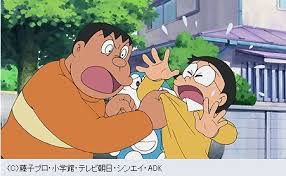
The characters Takeshi Goda and Nobita from the Japanese cartoon
Doraemon
In the later part of the video, the
individual who looks like Siu Yau-wai chased after a smaller boy, punching
him from above several times, pushing him with both hands and shouting out
"Fuck your mother!" at least twice. The victim said: "I am going to call the
police and report you for assault." The individual who looks like Siu left
upon hearing the threat to call the police.
From the video, Internet users noted that
the individual in the video wore a similar watch as Siu at the press
conference. Furthermore, the individual wore the uniform pants of a Shenzhen
school and wondered if Siu was really not attending school.
Our reporter canvassed the Shun Lee Estate
neighborhood. A neighbor said that the grandmother-grandson have been
spotted around the shopping mall before, not as if the child was housebound,
adding that the two are liars. Other children said that Siu is a local bully
who hogs the Masked Superman game machine outside the convenience store.

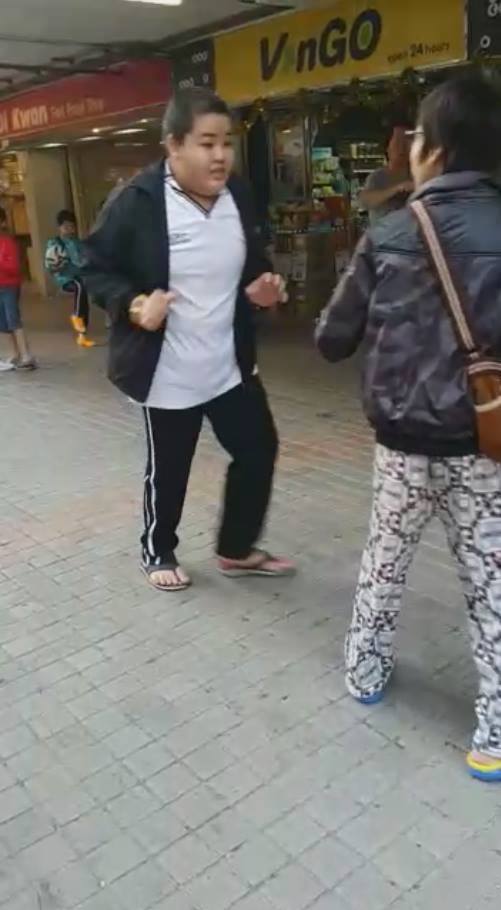
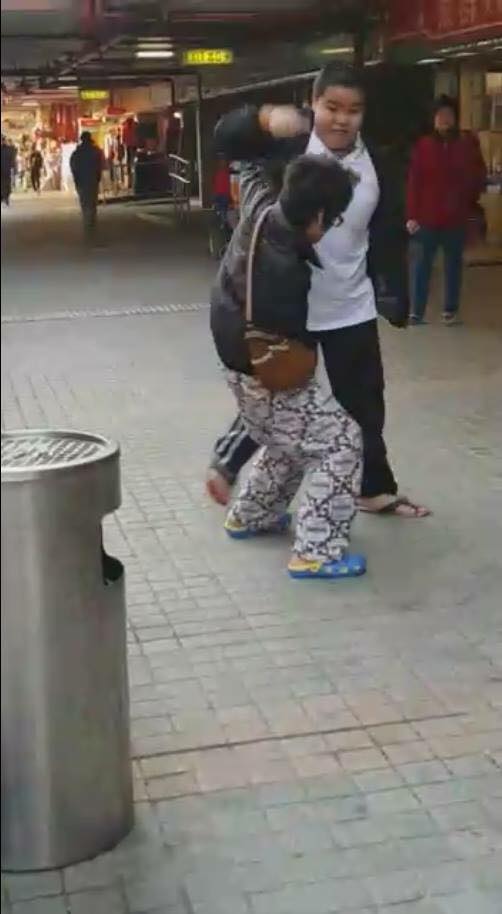
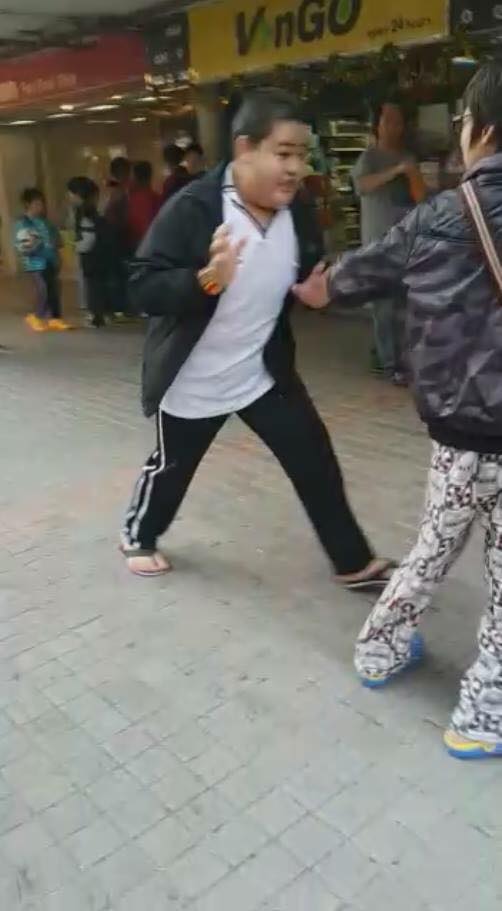
(Apple
Daily) May 22, 2015.
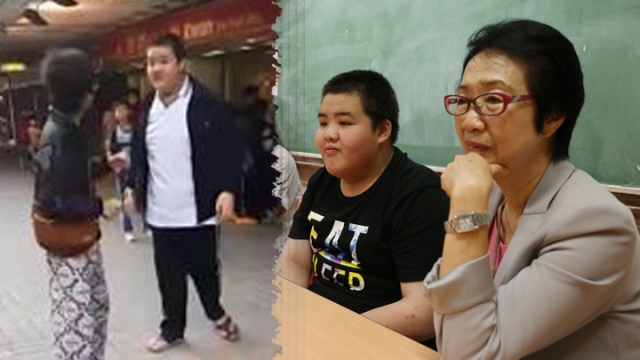
Legislative Councilor Chan Yuen-han said
that she watched the video and then called Siu Yau-wai whether it was him in
the video. Siu admitted: "I was the person." But Chan declined to say why
Siu was fighting. She only said: "I felt very uncomfortable after I heard
it."
Chan is aware of the negative criticisms on
the Internet, but she thinks that the present priority is to make sure that
Siu will grow up healthy both physically and mentally, and that means
being happy in school. The earlier fight only shows that the grandmother
made the right decision to turn themselves in and to fight for right of
abode for the grandson. Chan said that Siu needs a normal life, and she
hopes that society can shower more love and tolerance.
(Oriental
Daily) May 24, 2015.
Confucian Tai Shing Primary School issued a
statement today. First of all, with respect to Siu Yau-wai, the school
received a call from Legislator Chan Yuen-han on May 20 and arranged for Siu
to take an abilities test. This was not an school examination, and Siu has
not applied to the school for admission. As to whether Siu will attend the
school, it depends on whether he can obtain the necessary documents, and whether
the Education Department will arrange so as well as the decision of Siu and
his guardian.
As for the demonstration at the school
during which a little girl was scared into tears, the school said that they
had originally scheduled a walk to raise money. But the Observatory issued a
Yellow Rain alert and the event was canceled. More than 100 hundred students
remained at the school waiting for their parents to come and pick them up.
(The
Standard) May 27, 2015.
Chief Executive Leung
Chun-ying yesterday condemned radical groups for aggressively campaigning for
the repatriation of a 12-year-old mainland boy who has been living illegally
in Hong Kong for nine years. He said actions by these groups which included
storming the offices of Federation of Trade Unions lawmaker Chan Yuen-han and
a school that gave an aptitude test to Siu Yau-wai needed to be condemned.
Leung questioned if the level of opposition
would have been the same from radical groups including Hong Kong Localism
Power, Civic Passion and Hong Kong Indigenous had Siu been from any place
other than the mainland.
"Everyone will ask this question, if he is
not from the mainland but another place, will these radical groups resort to
the same tactics to express their dissatisfaction? Everyone should think about
this question," he said. "Hong Kong is a society adhering to the rule of law,
we have the policies and laws to handle these cases. We cannot tolerate anyone
who uses uncivilized acts and even violates laws to express opinions."
(SCMP)
May 27, 2015.
Chief Executive Leung Chun-ying condemned
"radical" activists yesterday for "destroying social order" by protesting
against an undocumented mainland boy's effort to stay in the city. Leung
questioned whether the activists would be so concerned if the boy, 12-year-old
Siu Yau-wai, was not from the mainland.
Leung emphasised the authorities would
handle the case according to law. "A small minority of radicals expressed
their opinion by storming [buildings] or destroying social order. We should
reprimand these actions," he said, when asked whether the government might
succumb to pressure by the activists. "If [Yau-wai] were not from the mainland
… would these radicals adopt the same approach?"
On Monday, activist group Valiant
Frontier protested at Shun Lee Estate in Ngau Tau Kok, where the boy and his
grandmother were believed to have been living. The pair have apparently moved
out. The group's spokesman, who introduced himself as Ah Sing, responded to
questions on RTHK yesterday as to why they did not go to the immigration
authorities. "We have to 'kill one to warn 100' who are abusing loopholes in
the system to get the right of abode," he said.
(SCMP)
No wonder undocumented boy Siu Yau-wai wants to leave Hong Kong. By Alex Lo.
June 5, 2015.
In the sorry saga of Siu Yau-wai, the
12-year-old boy who has lived in Hong Kong without identity documents for nine
years, the government turns out to be the only party that has behaved with a
measure of humanity and legal propriety. It's so rare for such a thing to
happen it deserves to be taken notice of when it does.
The case came to light thanks to unionist
legislator Chan Yuen-han calling a widely covered press conference to
highlight the boy's plight. Chan might have had a good motive, but she failed
to anticipate the levels of anti-mainland sentiment the case would provoke. In
retrospect, that was not that hard to predict. Yet, the ugly backlash surely
must have contributed to Yau-wai and his family's decision to leave Hong Kong
and go back to the mainland. Chan clearly bears direct responsibility for the
hasty manner in which she exposed the child and his grandmother to a media
maelstrom.
Xenophobic groups organised rallies to
condemn the family. Some protesters carried photos of young Yau-wai to
denounce him as a criminal. They also criticised the Immigration Department
for issuing a temporary permit to Yau-wai and protested outside a school that
helped assess his scholastic standards, claiming he deserved no right of abode
or a local school place. The elementary fact that he wasn't offered the right
of abode or a school place seemed to have completely escaped the protesters.
If nothing else, those xenophobes bring out
the worst and ugliest of Hong Kong people. So it was left to officials to take
care of the kid with some measure of humanity. The temporary permit was given
to him as a way to make sure he wouldn't be arrested in the streets. His
grandmother was arrested on suspicion of aiding and abetting others in breach
of condition of stay and granted bail. A probe was opened to determine whether
there might be a basis to allow Yau-wai to stay in Hong Kong.
Now that he has decided to leave Hong Kong,
the department has granted permission to his grandmother to take him back to
Shenzhen even though she is on bail. Given the disgraceful and disgusting way
he has been treated by the Hong Kong public, who in his right mind would want
to stay?
We wish him a happier life on the mainland.
(SCMP)
Mainland Chinese family of ‘stateless’ boy ‘fit and willing to take him in’,
report claims. June 5, 2015.
Questions resurfaced this morning about the
family situation of a 12-year-old boy who had lived in Hong Kong illegally for
nine years after a newspaper report refuted claims made by his grandmother
that they were unfit and unwilling to receive him. The whereabouts of the boy,
Siu Yau-wai, and his grandmother Chow Siu-shuen were unknown this morning
after he was voluntarily deported and taken back to mainland China last night.
Chow last month claimed that Yau-wai’s
parents were unwilling to take care of the boy because his father had lost a
leg in an industrial accident and his mother earlier had breast cancer. But
Chinese-language newspaper Ming Pao reported today that the mainland
Public Security Bureau had found Yau-wai’s parents and that they were willing
to receive him. It also said the father did not experience an industrial
accident or lose his leg and and that the couple had another elder son. The
newspaper also said the two-way permit on which Yau-wai had used to come to
Hong Kong was in his own name, contrary to his grandmother's claims that it
was another child's.
However, “family members” who were supposed
to be waiting for Yau-wai on the other side of the border did not show up when
they arrived in Shenzhen last night. Asked if any of Yau-wai’s relatives or
parents were coming to pick him up, Chow said: “No one wants him. We don’t
have a plan as to what we should do.”
The two later hopped into a taxi to escape a
media pack which had followed them across the border. Chow, a Hong Kong
resident, had said she would come back to the city on June 23.
Yau-wai had been receiving help from
Federation of Trade Unions legislator Chan Yuen-han. Speaking to RTHK today,
fellow FTU legislator Wong Kwok-kin said he believed Chan did not know about
the status of Yau-wai’s parents because legislators could only rely on claims
made by people who seek their assistance. “As a legislator, we can only listen
to one side: that is the person seeking our assistance. We don’t have the
capacity to verify whether their claims are true, or which part of claims are
true,” he said. Wong said that Yau-wai decided to be voluntarily deported to
mainland China after he was harassed in the middle of the night. The boy and
his grandmother contacted Chan via her assistants on Wednesday, saying he
wanted to leave Hong Kong, Wong said. “They said they had moved to a new
residence to avoid harassment, but the harassment continued. People knocked on
their door and made noises in the middle of the night,” Wong said. He did not
say who the people were. “Yau-wai, even though is a big boy, is a 12-year-old
child after all. Probably he could not stand it. He cried a lot, they said.
And his grandmother felt for the boy and therefore said she thought of sending
him back,” Wong said.
Localist groups had protested against the
boy’s bid to stay in Hong Kong and campaigned for him to be sent back to the
mainland. Chow last month said she brought Yau-wai to the city from the
mainland using another child’s two-way permit, which allows a short stay, in
2006. Wong said Yau-wai and Chow asked Chan for advice on whether to send him
back to the mainland. Chan told them that it was up to them to decide and
think thoroughly first, Wong said. He also said reaction to the boy’s case was
“unexpected” and Chan felt she was under pressure when handling his case. “She
felt that the community was a bit too harsh on the child,” he said.
Asked if Chan had made the wrong move in
making the boy’s case public, Wong said: “Chan is a very compassionate person.
When she receives a [request for assistance] she wants it to be successful and
to be handled well. “I believe probably at the time [she] went public in the
hope of making government departments pay more attention to the case so it
could be handled better and more successfully,” Wong said. Chan yesterday said
the decision to repatriate Yau-wai was made by his grandmother and she
respected her choice. She declined to make further comment.
(SCMP)
We were duped and dumped, says grandmother of Siu Yau-wai as they are
abandoned in Shenzhen. June 7, 2015.
The plight of the 12-year-old boy who led an
undocumented life for nine years in Hong Kong has taken a dramatic twist after
his grandmother claimed the pair were duped into returning to the mainland and
later dumped by a mysterious driver in the middle of nowhere in Shenzhen. But
both parties involved in the accusations, the Immigration Department and the
Federation of Trade Unions, were quick to deny the accusations.
In an exclusive interview yesterday, the
boy's grandmother alleged she was contacted on Thursday by an assistant of
Federation of Trade Unions lawmaker Chan Yuen-han, who first revealed their
plight, and told that Siu Yau-wai's parents had been located on the mainland.
The assistant told the grandmother Chow Siu-shuen, 67, at 1.30pm that the pair
must appear at the Immigration Department 11/2 hours later or immigration
officers would forcibly hand the boy over to mainland authorities.
"Even when I arrived at the Immigration
Department, the officers said that [Yau-wai's] parents had been found, and
that they would pick him up in Shenzhen," Chow said in a small flat they
rented in Shenzhen yesterday. It was only after they crossed the border that
they realised the boy's parents were not there.
She said she decided to sign the documents to
voluntarily deport Yau-wai only because she was told his parents would be
waiting. She now regretted the decision as he was now in Shenzhen with no
documents except an expired two-way permit.
Adding to the drama, Chow said, was that they
hopped in a car arranged by the FTU outside the Shenzhen checkpoint. The
driver took them to the middle of nowhere. "I asked the driver where he was
taking us. He said he was paid to take us as far as possible. I started to
panic and told him to stop … He eventually dropped us off in the middle of
nowhere," she claimed. Chow said she was now uncertain what to do next.
An Immigration Department spokesman said it
had "never demanded" the pair request voluntary repatriation. "As witnessed by
the representatives of the Federation of Trade Unions who accompanied the
minor and his grandmother to our office on June 4, the grandmother informed
[the department] that it was her intention to take the minor back to the
mainland and she confirmed that the minor would be received by their family
members on the mainland," he said. The department had verified the boy's
identity with mainland authorities and confirmed he was a mainland resident.
An FTU source said: "The grandmother called
us on Thursday saying that they had been harassed for a few days as people
kept knocking on their door and therefore they wanted to leave." The source
denied Chow's accusation that the FTU had paid the car driver to go "as far as
possible". A spokesman for Chan Yuen-han's office said: "We will look at the
allegations but have no comment to make at this time.''
(Sing
Tao) June 7, 2015.
Our newspaper reporter headed straight to the
hometown of Siu Yau-wai, in Maobei village, Haojiang district, Shantou city.
We learned that Siu's father Xiao Huihong and mother have two sons. The elder
son is 18 years old, and Siu Yau-wai is the younger son. The family used to
live in with their grandmother and the fifth brother of Xiao. More than a
decade also, Xiu built a new house at Number 32, Maohua Lane and moved there.
According to the local government records,
Siu Yau-wai was born and registered there, including an ID number. His
residence is Number 32 Maohua Lane. After the case became public, the Hong
Kong Immigration Department called the local government to find out about the
particulars. When Siu was three years old, Xiao lost four fingers in an
industrial accident. Xiao told the reporter by phone that the family was too
poor to support Siu and therefore he heeded the advice of his wife to send Siu
away. At the time, Siu's maternal grandmother was in Hong Kong and decided to
bring Siu there. The two-way temporary visa was applied through the local
public security bureau. Siu overstayed in Hong Kong for nine years.
According to Xiao, he still cannot afford to
feed Siu now that he has returned. But a neighbor pointed out that Xiao had
plenty of money to build a three-storey house but no money to feed his son. He
accused Xiao of not wanting to take care of his son. After Siu's case became
public, both Xiao and his wife have disappeared. The 18-year-old son was left
for other relatives to look after, but he has disappeared too.
(Oriental
Daily) June 7, 2015.
Previously, Chow Siu-shuen declared that she
has not been able to contact her daughter Zhou(who is the mother of Siu
Yau-wai). According to information that we received, the daughter Zhou has
traveled back and forth between Hong Kong and mainland multiple times,
sometimes in the company of her mother Chow. The most recent trip was made
early this year. This meant that Chow and Zhou have been in constant contract.
Chow also claimed that Siu came to Hong Kong
on a two-way visa issued for someone else and that Siu has no mainland
household registration. This is incorrect, because Siu came to Hong Kong on a
two-way visa issued to himself and that Siu is registered in Shantou.
Chow claimed that Siu's father was amputated,
but he in fact only lost some fingers in an industrial accident.
The Immigration Department said that it was
the grandmother who requested the boy to return to the mainland voluntarily.
The Department has never threatened to force them to appear before 3pm on June
4th or face forced expulsion otherwise. The Federation of Trade Unions
representatives can bear witness to that. Furthermore, the grandmother told
the Immigration Department that they will be met by family members when they
cross the border. Earlier, the Immigration Department had confirmed with
mainland authorities that Siu is indeed a mainland resident. That was why they
went along with the grandmother's request.
(Apple
Daily) June 7, 2015.
Cable TV managed to interview the mother of
Siu Yau-wai by telephone. She denied that she was taking Siu back. She cursed
her mother: "She is crazy ... she is sick and she needs to visit a doctor."
She said, "Siu is a bad omen for me ... I abandoned him more than a decade
ago. Why does she want to bring him to see me!" She admitted that she had
visited Hong Kong a number of times. But she said that was in order to pray to
Buddha and not to see Siu.
(SCMP)
June 8, 2015.
The moment Chow Siu-shuen started talking
about a fraught recent meeting with her daughter in Shenzhen, tears came
running down her cheeks. Chow, 67, is the grandmother of Siu Yau-wai, the
12-year-old boy who led an undocumented life for nine years in Hong Kong. She
is also the mother of Wu Chuyan, who gave birth to Siu 12 years ago.
"A few days before I turned Yau-wai in to the
Immigration Department for the first time, I called his mother. I told her to
meet me in Shenzhen for an important matter. I did not tell her that I was
going to ask her to take her boy back," Chow told the South China Morning Post
yesterday.
Although she probably did not have a clue
what Chow was going to say, Wu, now 36, showed up in Shenzhen. They sat down
on a bench outside the Lo Wu border checkpoint.
"I said I was worried about her boy after
reading about the suicide of a girl with no legal documents in Hong Kong. I
asked her to take her boy back to the mainland," Chow said. "She kept scolding
me in a way almost as if she wanted me dead. She said she did not want to take
her boy back and I should just push him down a hill or into the sea."
She said she did not reveal the last
encounter with her daughter in last month's press conference because she was
too embarrassed by her "ruthlessness" and mean words. "How could I talk about
that in public? How could I tell everyone in detail how my daughter abandoned
her boy? I would be crying in public if I did so," she said tearfully.
Chow, who is originally from Chaoyang
district near Shantou city, said she was separated from Wu in 1993 when she
settled in Hong Kong to reunite with her husband. She said she was forced to
leave Wu behind with their relatives in Chaoyang as government policy allowed
her to bring only one child along, and she took her younger daughter. Wu did
not like to go to school and was always fighting, Chow said. "I don't think
she could even write her own name in full," she added. She said she had
limited contact with Wu since they separated, and did not even know Wu had
married a man in Shantou until afterwards.
Then Yau-wai was born 12 years ago. His
parents abandoned him when he was still an infant, and Chow took him to Hong
Kong on a two-way permit. The permit was paid for by Chow's mother -Yau-wai's
great grandmother - who died some years ago from breast cancer.
During the nine years Yau-wai was in Hong
Kong, he did not have any friends. His grandmother usually only let him go out
to play for about an hour for fear that the police would find out he was
undocumented. "I told him not to fight with anyone. Even if someone fought
him, I told him not to fight back. If he saw the police, I told him to hide in
the toilet or go buy some candy," Chow said. Chow said she had no contact
whatsoever with Wu's husband, Xiao Huihong.
A visit by the Post to the hometown of
Yau-wai's father in the old Maobei village in Shantou found the area
dilapidated and mostly abandoned.
Yau-wai's other grandmother, who is in her
mid-80s, said she did not have many memories of the boy and only took care of
him from time to time before he was sent away at around the age of four. "He
was quite round and plump when he was little," said the grandmother, who said
she had forgotten her name.
When the Post showed her a recent photo of
Yau-wai, she said: "Now he doesn't look that round." As she did not live with
family, she said she did not know that the boy was being sent away until
several days after when her son, the boy's father, told her.
"I didn't have special feelings at that
time," she said. "But it will be good if [Yau-wai's parents] could take him
back because then I'll have another grandson."
Yau-wai's uncle Xiao Huizhi refused to talk
about the boy's father yesterday. Xiao's daughter said Yau-wai's father had
not visited her family for years.
(SCMP)
Hong Kong must beware the dangers of 'localism'. Editorial. June 8,
2015.
There is nothing wrong with promoting local
values and culture. But there is every reason to be concerned if such acts
turn into intolerance, xenophobia or even aggressive behaviour, as reflected
in the controversy surrounding Siu Yau-wai, who surrendered himself two weeks
ago after overstaying in the city for nine years. The boy, now 12, eventually
returned to the mainland on Thursday, after rowdy protests by groups
championing so-called "localism". The Immigration Department maintained that
the repatriation was voluntary, but Siu's grandmother lamented that Hong Kong
had no place for the boy.
The rise of localism can be traced back to
2006, when heritage lovers protested against the demolition of the iconic Star
Ferry Pier and the Queen's Pier. Increasingly, it has taken on an edgy twist,
with followers taking to the streets in the name of defending Hong Kong's
autonomy and keeping mainland influence at bay. The movement has already
spread to different social and political spheres. From demonstrations against
the influx of mainland tourists to schooling for children from across the
border, and from the Occupy protests to the June 4 remembrance, the
anti-mainland sentiment is widespread.
Those "localists" may think they are
defending the place they call home. But their actions against Yau-wai have
damaged Hong Kong's reputation as an international city that is compassionate
and inclusive. The trend has, indeed, strained Beijing-Hong Kong relations and
risks spinning into something more sinister than simply preserving the city's
identity. Concerns are growing that it may turn into a pro-independence force,
something Beijing would not tolerate.
It should be noted that such voices are still
a minority in society. But it is nonetheless an issue of concern as they
become more active and vocal. Some groups are known for their tendency to
challenge rules and norms, so much so that they often go beyond what is seen
as acceptable. In the case of Yau-wai, the protesters have not just targeted
the lawmaker who tried to help the boy, but also the school that tested the
ability of the boy, who was claimed to have been abandoned by his mainland
parents and who had not received proper education since arriving here at the
age of three. They plastered posters with the words "traitors" and "my
classmate is an illegal immigrant" on the school's entrance. Freedom of
expression is a core value. But it is not an excuse for vilification and
unruly behaviour.
(EJinsight)
Unanswered questions in Siu Yau-wai case. By Lai Chak-fun. June 11, 2015.
The case
of Siu Yau-wai, a boy who recently returned to the mainland after staying
illegally in Hong Kong for nine years, is getting more and more puzzling.
Someone must be lying. It could be Siu’s grandmother Chow Siu-shuen, who had
hidden the 12-year-old boy in the city, legislator Chan Yuen-han who made the
case public to put pressure on the government to allow the boy to stay, or
even the Immigration Department. Even Siu’s so-called “voluntary repatriation”
could have been carried out without following normal procedures.
Based on
what we already know, it is without question that Siu’s grandmother was lying.
However, it appears she wasn’t involved in any falsification of identity
documents as was reported by media earlier on.
Since
Siu entered Hong Kong on a two-way permit, what the grandmother did was to aid
and abet the breaching of her grandson’s conditions of stay. That constitutes
a lesser crime than forgery of documents. But rather intriguingly, the
Immigration Department so far hasn’t commented on the details of Siu’s case,
nor has it clarified false media reports about the use of false documents and
his “voluntary repatriation”.
Among
the parties involved, Chan Yuen-han appears to be the most suspicious. As a
seasoned lawmaker, Chan has probably handled hundreds of thousands of requests
for help from the public over the years. She definitely knows the drill.
This begs the question: Had Chan
ever looked into Siu’s case carefully before she agreed to offer help? If she
hadn’t done so then that would have been pure negligence on her part.
However, if Chan still chose to make
the case public in such a high-profile manner in order to put pressure on the
Immigration Department to make an exception, even
though she knew Siu and his grandmother were lying, then what she did would
have constituted not only abuse of power, but also aiding and abetting fraud
or even obstruction of justice.
If so, she must be held accountable and brought
to justice immediately.
In fact, all Chan needed to do was to check
with the Immigration Department to verify the boy’s identity and find out
whether what Siu and his grandmother said was true. However, if she still
called a press conference and put Siu in the spotlight, even though she knew
his grandmother was making up stories, then the only possible explanation is
that the whole thing was nothing but a carefully planned publicity stunt
through which Chan was attempting to gain favor with new immigrants and win
their votes in the upcoming elections by helping a “poor little” undocumented
mainland child to gain the right of abode in Hong Kong.
Ironically, however, Chan’s plan seemed
to have backfired, as many members of the Federation of Trade Unions (FTU) in
the North West New Territories filed complaints against her act. They
probably did that out of their own selfishness and xenophobic sentiment.
But the case also suggests that Chan has
seriously underestimated the influence of the rise of “nativism” on the
political atmosphere in Hong Kong.
It might
also suggest that some young and ambitious political hopefuls in the FTU who
are so eager to get the top job are not afraid of going to great lengths to
challenge old party leaders such as Chan, who has occupied her Legislative
Council seat for so many years.
It is estimated that there are currently more
than 30 mainland-born children in Hong Kong who share a similar situation with
Siu, and all of whom have been granted “recognizance forms” or “walk-free
permits”, under which they are allowed to stay temporarily pending
investigation.
For some unknown reasons, Chan chose to
bring Siu to media attention and called for leniency in order to generate a
buzz. Then the
Immigration Department, Education Bureau, Housing Department and even the
Labour and Welfare Bureau quickly rallied in support of Chan.
This
makes us wonder if the whole event was a big act carefully planned and
orchestrated by indigenous communists and the Hong Kong government to test the
waters. Could it be that they wanted to gauge the public reaction to allowing
undocumented mainland children to stay in Hong Kong, paving the way for
further integration between our city and the mainland? In fact, the entire
incident was a bizarre farce, and nobody knows how the case will end up.
Perhaps
he might disappear for good, which might be in the best interest of all the
parties involved, including the shameless politicians, the government and the
mainland customs. Given the
notoriously short attention span of the local media, Siu’s case may be
forgotten very soon, and the indigenous faction might then claim credit for
his repatriation.
After
that everything will be business as usual, and Hong Kong will just continue to
deteriorate.
(The
Standard) Netizens deride new parents search. June 29, 2015.
An expression of hope by the grandmother of
Shiu Yau-wai that new parents in Hong Kong can be found for the undocumented
child has been met with derision by netizens. In an interview with Sing Tao
Daily, Chow Siu-shuen said mainland authorities have refused to grant the
12-year-old boy a two-way permit due to his having overstayed for nine years.
The two are now living in a cramped room in Shenzhen after the boy accepted
voluntary repatriation from Hong Kong on June 4.
The 67-year-old grandmother said she cannot
take care of Shiu for much longer and hopes someone in Hong Kong will adopt
the boy. She has spelled out certain criteria for the adoptive parents: they
should be caring, able to send Shiu to school and allow him to visit her
regularly.
During the interview, Shiu said he still
wants to live with his grandmother. He is willing to live with others but not
his biological father, whom he visited in Shantou for the first time. "I would
rather live with my grandmother or any other," he said. "I will not attend his
or that woman's [his mother] funeral."
Shiu met his mother two years ago but did not
know her identity at that time. The woman called herself "auntie" and has
repeatedly refused to take the boy back.
Shiu said he wanted to go to school, but understands that it may be too much
of a financial burden for his grandmother.
People online were not sympathetic, saying a
search for adoptive parents does not make sense. Such an approach was similar
to finding a new owner for a secondhand car, internet user "ZC Taylor" said.
Another, Fiona Ng, said: "Why is it necessary to find new parents? He is
already grown up, and his parents are alive." Golden Forum users wondered why
the grandmother insists on adoptive parents from Hong Kong.
Videos:
(Apple Daily)
https://www.youtube.com/watch?v=42tRX452GFw News report including the
Shun Lee estate fight.
(Ming Pao)
https://www.youtube.com/watch?v=ku7lGd547tA Ming Pao press conference,
in which Chan Yuen-han escorts him to file the relevant paperwork.
(Crazy)
https://www.youtube.com/watch?v=il1Pudd2fpU Full 2:20 video. The
fighting starts at 1:35.
(SocREC)
https://www.youtube.com/watch?v=aOA5LPhdUe8 Speechmaking in front of the
Confucian Tai Shing Primary School.
(SocREC)
https://www.youtube.com/watch?v=2J8LBZnXles Telephone interview of Mr.
Ho
Internet comments:
- Patrick Luk (of the Be Careful When You
Drive forum)
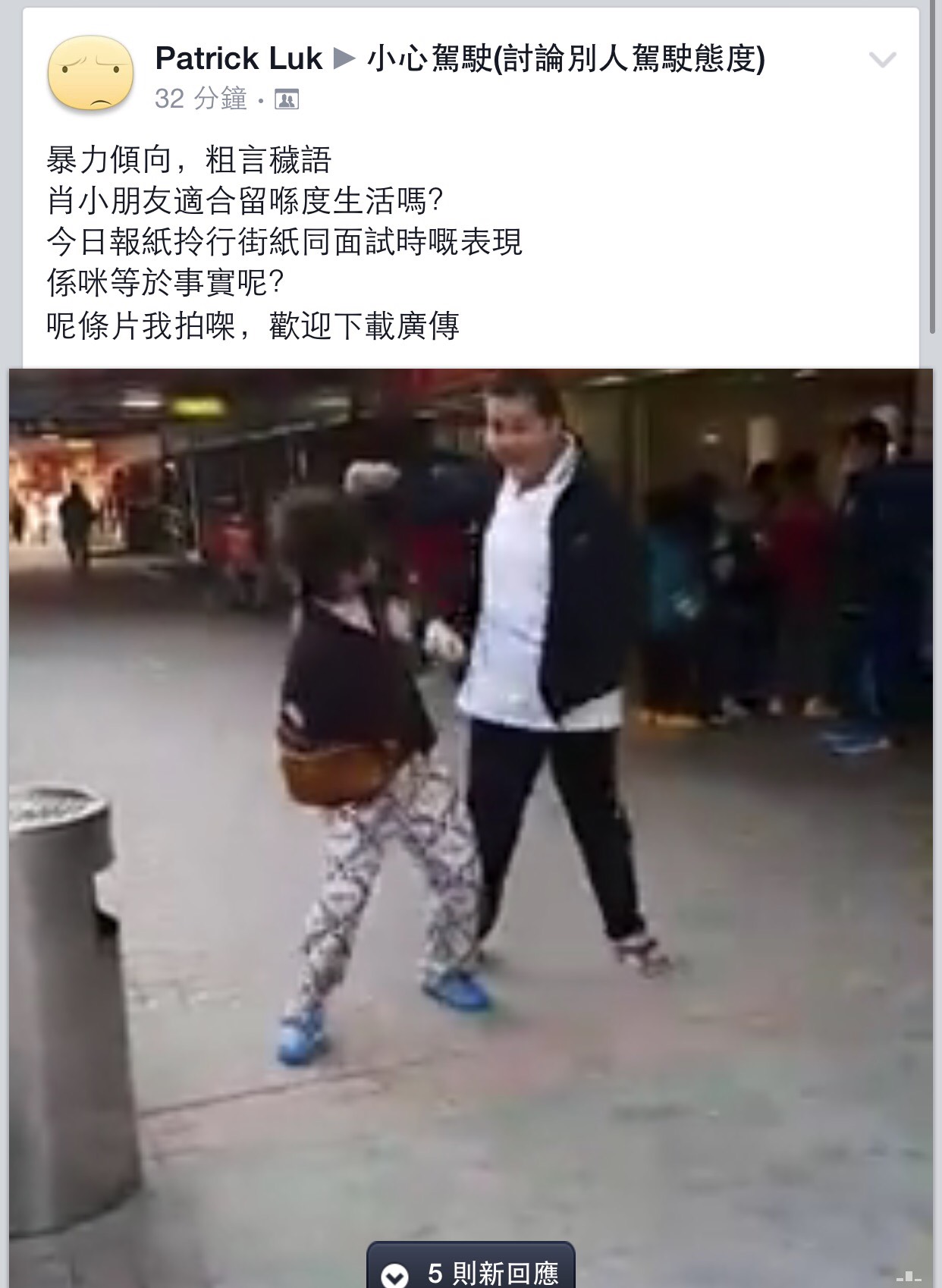
(in translation)
Violent tendencies, foul language
Is our little friend Siu suitable to live here?
Today's newspaper reports about him receiving a temporary stay and
performing for the interview
Are these all the facts?
I took this video. You are welcome to download and disseminate
- The video has been edited. There was a
gap between the initial bantering and the fight. The little runt must have
done something to provoke Siu. Then the aftermath of the fight has been
edited out. That was the part when Nobita asked Doraemon to use his magic to
vanquish Takeshi Goda.
- Siu Yau-wai has a future as a sumo
wrestler because he is fat and aggressive. So he should be deported to
Japan.
- It is nice of Chan to talk about the
physical and mental well-being of Siu Yau-wai. How about the physical and
mental well-being of the 7-year-old primary school classmates who have to
put up with a Godzilla-sized bully? What about them?
- That is not true. Siu Yau-wai has been assessed to have achieved the
equivalent of third-year primary school. Therefore, his classmates will be
9-year-olds. However, he is over-sized even among 12-year-olds.
- How does he achieve third-year equivalency when he is housebound according
to his grandmother? This is just lies stacked upon more lies.
- The grandmother is said to be a high school graduate, and she was the one
who taught him at home.
- That Siu Yau-wai is 12-years-old is completely based upon the assertion of
the grandmother. That really remains to be seen after a thorough
investigation.
- Someone at Galden Forum uploaded the photo of Siu onto Microsoft's facial
recognition program and determined 'it' to be a 23-year-old female.
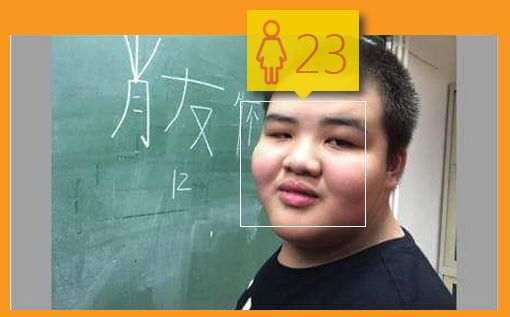
- Hong Kong Golden Forum
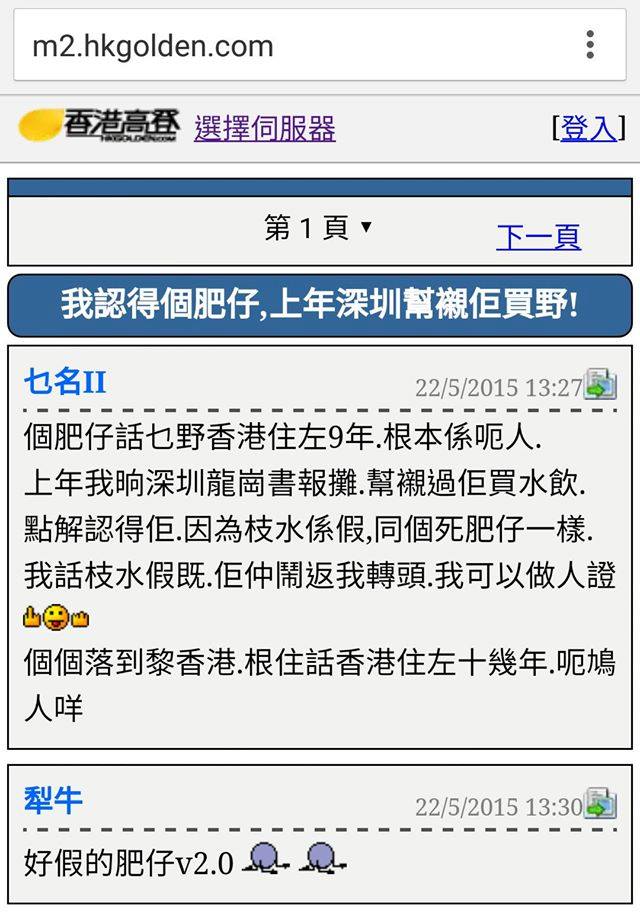
(in translation) This fat boy claimed to
have lived in Hong Kong for 9 years. He is lying. Last year, I bought a
bottle of water from him at a newsstand in Longgong (Shenzhen). I remembered
it because the bottle was as fake as the damned fat boy. I told him that the
bottle was fake. He cursed me back. I am willing to bear witness. Everybody
who comes down here claims to have lived here for decades. Fucking liars!
- There is an Internet saying: "Do not
following the preceding car too closely, because you may run into an
accident." This refers to being careful to comment before all the facts are
known, because you may be caught looking foolish. Chan Yuen-han has just ran
into the preceding car.
- This is normally the sort of dumb thing that the Civic Party would do.
This time, Chan Yuen-han jumped the gun to her eternal regret.
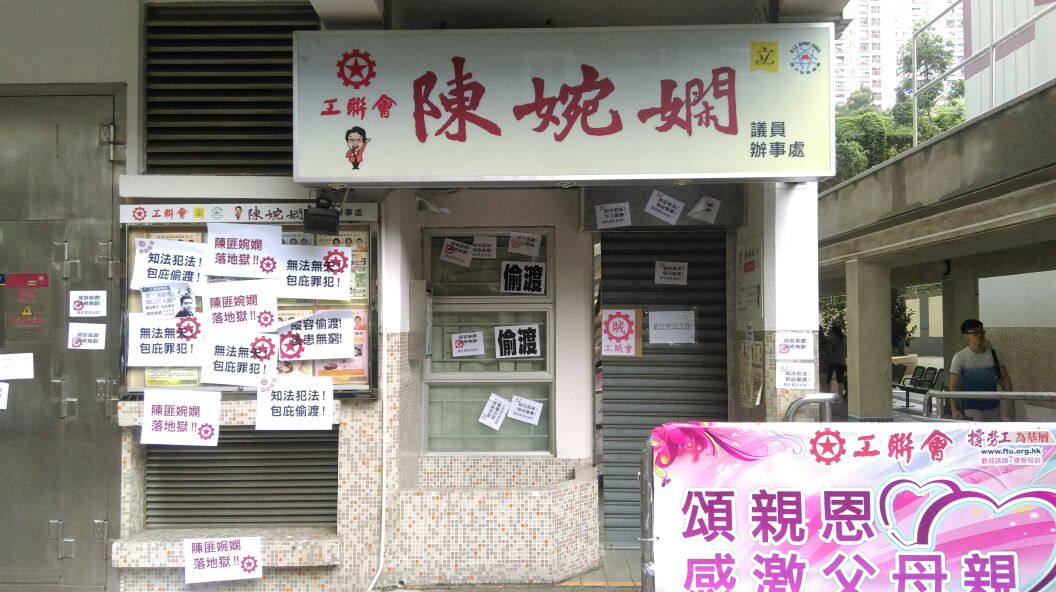
Chan Yuen-han's office is plastered with sheets telling her to come to hell.
- The seeds of the backlash against Siu
Yau-wai were sowed back in the 2001 case of
Chong Fung-yuen whereupon Chinese citizens born in Hong Kong were
ruled to have the right of abode regardless of the Hong Kong immigration
status of their parents. That ruling lead to the fear that mainland women would
rush to give birth in Hong Kong. In an interview, Chong, by then 14 and a
Form 1 student in Tuen Mun, described being affected by internet users'
taunts of him as a "locust" and a "criminal". Letting Siu in would
open the door for hordes of imitators.
- In a way, this case reflects
current
politics. In the past, there are plenty of individual cases in which
mainland children were granted residency out of humanitarian concerns.
None of
those cases drew attention. So it becomes strange to see the radical
elements raise this present case as a rule-of-law issue. If Siu
Yau-wai is not entitled to right of abode under the law, then he must be
expelled. That seems righteous and justifiable. But the fact is that
in
recent years, tens of thousands of South Asians and Africans have
entered
Hong Kong either illegally or legally but overstayed, and then
petitioned
successfully not to be expelled. Some of these people stayed only to
work
illegally or committed crimes. Why didn't the radical elements
protest
against those people? If they didn't realize, then they know now. Do
you
think that they will go and protests against South Asians and
Africans
tomorrow? Of course not. Under the current political climate, the
target is
the Chinese government and its people, not India, Pakistan, Senegal,
Nigeria, Kenya or whatever.
- During moments like these, we need to
talk about ... international standards! What else!?
(Wikepedia)
DREAM Act
The DREAM Act (acronym for Development,
Relief, and Education for Alien Minors) is ... a multi-phase process for
undocumented immigrants in the United States that would first grant
conditional residency and upon meeting further qualifications, permanent
residency.
Requirements for conditional resident
status
- person must have proof that they
entered United States before the age of 16 and must have continuously
lived in the country for at least 5 years
- must have graduated from a United
States high school or obtained a GED
- person demonstrates good moral
character
- pass criminal background checks and
reviews
After having obtained and held
conditional resident status, permanent residency may be granted if the
following requirements have been met in a period of six years.
Requirements for permanent residency
- have attended an institution of higher
learning or served in the United States military for at least 2 years
and if discharged, have received an honorable discharge
- pass another series of background
checks
- continue to demonstrate good moral
character
If these requirements are not fulfilled
the conditional resident will lose their legal status and be subject to
deportation.
Good law? Unfortunately, the DREAM Act is
just a fantasy written on a piece of paper, and it has failed to pass
several times. Hong Kong legislator Chan Yuen-han should try to preach to
the Americans about love and tolerance.
- Under these circumstances (1) Siu has no
relatives in China and (2) he has resided in Hong Kong for more than 7 years
already, I am not obverse to granting him permission to stay. However, I am
seeing many suspicious indicators here:
(1) Although Siu has been in Hong Kong for 9 years, he chose to come out now
in a high-profile manner at a politically sensitive moment;
(2) He gave a press conference wearing a t-shirt with the English words (EAT
SLEEP RECYCLE) giving the impression that he is a wastrel;
(3) A video of him bullying a smaller boy conveniently gets circulated;
(4) He sought and obtained the assistance of Legislator Chan Yuen-han;
(5) A large number of new accounts were registered to voice opinion on his
case.
So the whole thing looks like a carefully manufactured affair. Therefore I
refuse to go along unless my suspicions are allayed.
- (Apple
Daily)
When Zhong Ruolin was three months old, her mother smuggled
her into Hong Kong. In 1995, she entered school and was found to have been
living in Hong Kong for eight years. She was arrested. On April 22, 1997, 30
members of the Royal Police Force, the Fire Department and the Social
Welfare Department sent her and her mother back to mainland China. Zhong
Ruolin did not resist, but she was crying. Her mother (who had over-stayed
in Hong Kong) was emotionally distraught and placed under handcuffs. In
January 1998, Zhong Ruolin received a one-way visa to re-united with her
family in Hong Kong. However, identification-less children continue to
enroll in Hong Kong schools. The Catholic Diocese even engaged in civil
disobedience and continued to educate these students against government
orders.
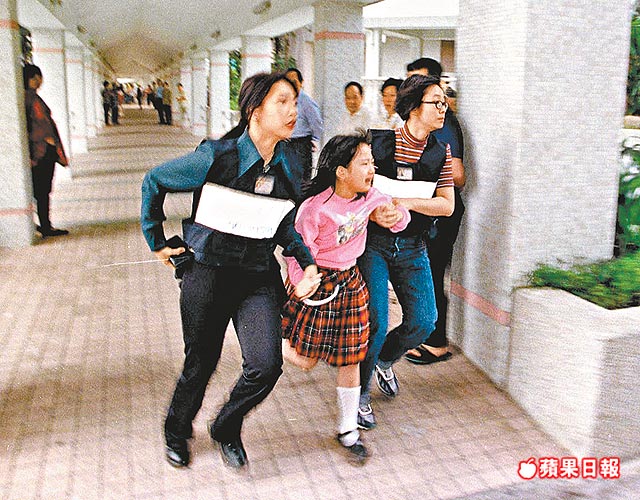
That was then, and this is now. Today all identification-less locusts must
be expelled immediately less they contaminate the air and waste our
resources.
- (Apple
Daily) May 11, 2015.
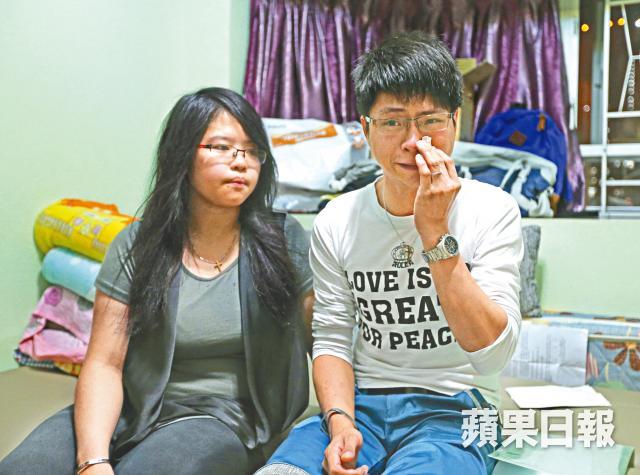
Sixteen years ago, 6-year-old Peng Ze-ju
was instructed by his family elders to admit that his aunt was his mother
and thereby came to Hong Kong from the mainland under the name Chan Pak-chung.
After graduating from middle school, he began working at a restaurant with a
salary of HK$17,000 per month. This year, he got married and his wife is
expecting.
Because Chan was brought up in Hong Kong,
he has gradually lost touch with the mainland. He describes mainlanders as
"Strong Nation People" and dislikes their spitting in the streets, jumping
queues, etc. "We have completely different lifestyles. Sending me back to
the mainland will kill me!"
Earlier this year, the Immigration
Department found out about the lie that his aunt and uncle told. They sent Peng
a letter to demand him to turn in his Hong Kong ID and depart
henceforth. Since he no longer has a Hong Kong ID, he couldn't work anymore.
He admits to our reporter that while the deception was wrong, "the
mistake occurred at a time when I was only 6 years old and I couldn't have
personally
prevented it." He now hopes that the Immigration Department director will
show compassion to grant him right of abode in Hong Kong.
Internet comments:
- Death to all locusts!!! The only
good locust is a dead locust!!!
- Once a locust, always a locust!!!
The only good locust is a dead locust!!!
- The Civic Passion/Hong Kong
Indigenous/Hong Kong Localism Power/Valiant Front warriors are going to show
up at Peng's place and valiantly take him back to China.
- You know about the argument in the Siu
Yau-wai case. Once you make one exception, the floodgates are opened and the
Mongol hordes will come rushing in.
- If every case is going to be reversed by
compassionate concerns (and I am sure that they all have their sob stories
to tell), we might as well as scrap the law.
- Several hundred thousand Hongkongers are
presently working on the mainland. They didn't all die as soon as they
stepped on the mainland, did they? Mr. Peng represents the quintessential
Hongkonger ignoramus who was brought up reading and trusting Apple Daily and
Ming Pao.
- Peng probably also believes that 50 million persons (or something) have
resigned from the Communist Party. The Falun Gong news media have reported
that, so it must be true.
- What happened to the traditional filial
piety of the Chinese people? Mr. Peng's mother is still living in a rural
village somewhere. Why isn't he taking care of her?
- Peng could hire Lee Cheuk-yan to seek
political asylum for himself in Hong Kong. The reasoning is that the
mainland has laws against illegal outbound immigrants and therefore Peng
risks prison (=torture) if he should be sent back.
- Before Peng gets sent back, he should
repay the people of Hong Kong for his education, healthcare, housing,
salary, marriage, etc. He stole all that from us before under false
pretenses.
- Peng has the nerve to say that he shouldn't be expelled because he has
made contributions to Hong Kong. The fact was that he stole the place in the
school and the job at the restaurant from other more deserving indigenous Hongkongers.
- Peng was notified to leave BEFORE he got
married this year. Furthermore, according to the dates, he got his
girlfriend pregnant and they got married right before the ultimatum issued
by the Immigration Department. So everything was cynically calculated to
procure right of abode, all the more reason to deny his plea.
- If Peng wants to stay longer until August
(for his child to be born), he can just walk into a 7-11 convenience store,
pick up a newspaper and walk out without paying. He will be arrested and
sentenced to jail, and be out just in time.
- Siu Yau-wai managed to get Legislative
Councilor Chan Yuan-han to take up his case. Mr. Peng managed to get Apple
Daily to take up his case with this report. Peng is doomed, and not because
his case lacks merits.
- Off the bat, the public doesn't trust anything in Apple Daily which has no
reporters, only fiction writers.
- Previously, the 70-year-old grandpa used
fake documents to continue working as a security guard instead of living off
social welfare. The grandpa was sentenced to four months in jail. Peng used
fake documents to procure residency. How would you rule in his case?
- (Oriental
Daily) May 23, 2015.
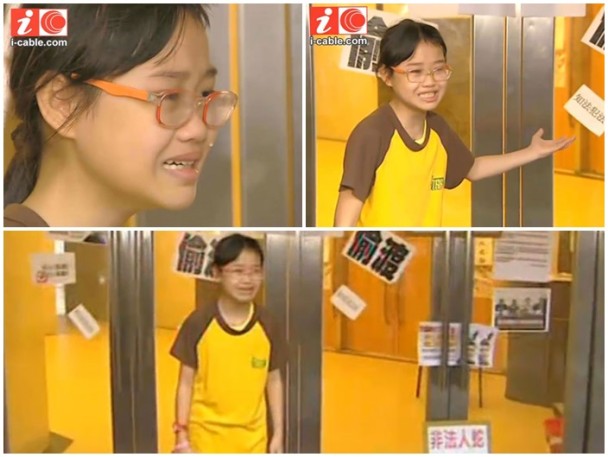
About 50 members of Hong Kong Localism
Power and Civic Power went to protest at legislator Chan Yuen-han's office
in Wong Tai Sin. Later they moved on to the Confucian Tai Shing Primary
School nearby.
A young female student saw the flyers that
were posted all over the front gate of her school, and started to cry. She
told those present: "Why? Our school provides knowledge for new students.
Why are they posting these sorts of things?" She did not know why the
demonstrators were doing this.
(Apple Daily)
https://www.youtube.com/watch?v=K0xpd0a1L6Q&feature=youtu.be News report
about how the Hong Kong Localism Power/Civic Passion demonstrators scared
a little girl into tears.
- Flashback to 2001:
At the time, Legislative Councilors Cyd
Ho, Cheung Man-kwong, Margaret Ng, Audrey Yu and Lo Wing-lok questioned
Security Bureau deputy-director Wong Wai-lun on the issue of school
education for children with no identification. They wanted to know why the
government was depriving these children of their right to education. Wong
repeated the directives that were given to the schools on the basis of the
existing Hong Kong immigration laws. Under those laws, visitors cannot
attend Hong Kong schools.
Legislators Cyd Ho and Margaret Ng
accused the government of violating the
United Nations Convention on the Rights of the Child, the
United
Nations' Universal Declaration of Human Rights, and other
internationals treaties.
Hong Kong Human Rights Monitor director
Law Yuk-kai was in the process of preparing a report for the United
Nations. He said that international treaties give children the right to an
education without any reference to their statuses. As a signatory of these
international treaties, Hong Kong is obliged to see that the treaties are
enforced accordingly.
Where the hell are Cyd Ho, Cheung Man-kwong,
Margaret Ng, Audrey Yu and Law Yuk-kai now? (Note: Lo Wing-lok has just
passed away) Answer: They know that they must seal their lips because they
cannot afford to rouse the wrath of Civic Passion/Hong Kong Localism Power.
Internet comments:
- I totally don't understand this. Why
should this little girl be scared of a bunch of screaming masked men in
front of the school entrance? Someone should explain to her that these
good people will bring democracy to her, and she will live happily forever
afterwards with them in charge of her life.
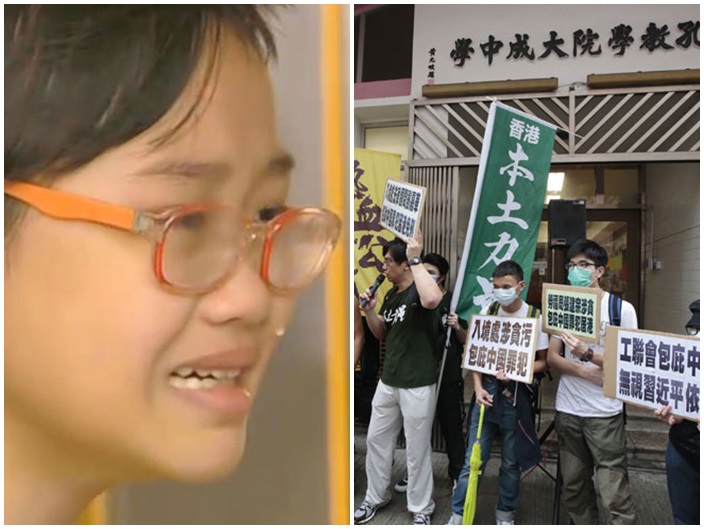
- Nice people that you wouldn't mind
encountering in a dark alley: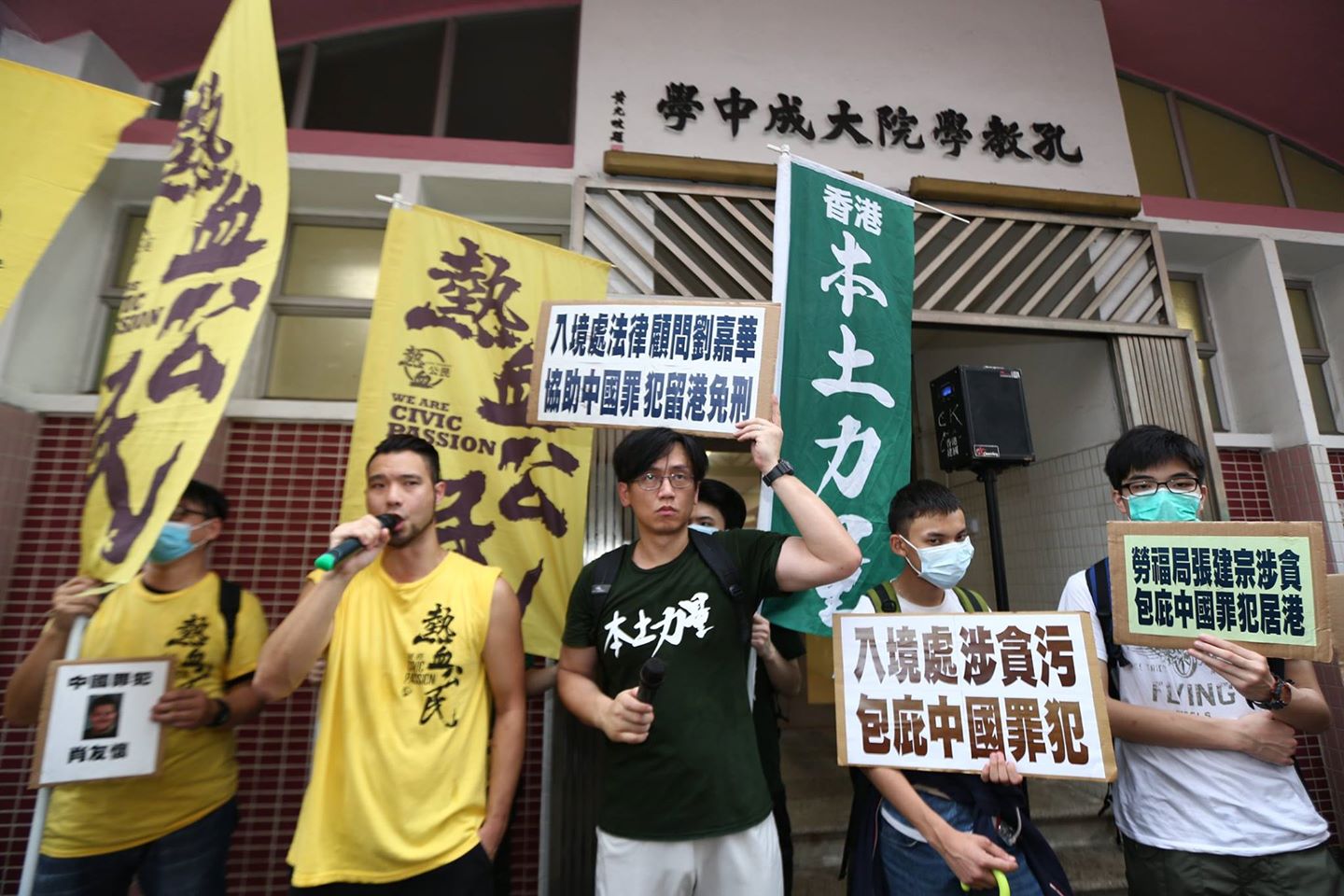
- Famous saying from foul-mouthed teacher
Alpais Lam: "Hanging out the banner and laying down wreaths caused me a
great deal of hurt. Parents and children were also hurt. What did I do
that was so unforgivable? Why are they treating me in this manner?"
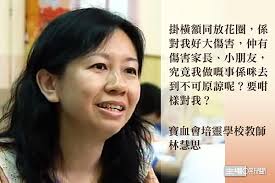
The same thing can be said here.
- Something is very wrong with this
picture. Why is this little girl out here alone? Where are her parents?
They should be prosecuted for negligence. The Child Welfare Department
must take custody of the little girl and send her to
Po Leung Kuk
immediately. Where are the school authorities? They should be prosecuted
for failure of supervision. We need to thank Hong Kong Localism Power/Civic
Passion and the media for bringing this shocking case of child abuse to
our attention.
- At any international school in Hong
Kong, most of the children are Three No's: Father not born in Hong Kong,
mother not born in Hong Kong and they themselves are not born in Hong
Kong. Why don't Hong Kong Localism Power/Civic Passion go and bang on
their front gates? Oh, they're white children ... never mind ... please go
back to whatever you were doing before ... we'll leave with our tails
between our legs ...
- Civic Passion's Wong Yeung-tat said
that each demonstration site is a battleground where things happen (such
as little girls crying) (see
Occupy Tsuen Wan/Sheung Shui/Sha Tin/Tuen Mu/Whatever).
So this is normal. Nothing to see here. Go back to whatever you were doing
before.
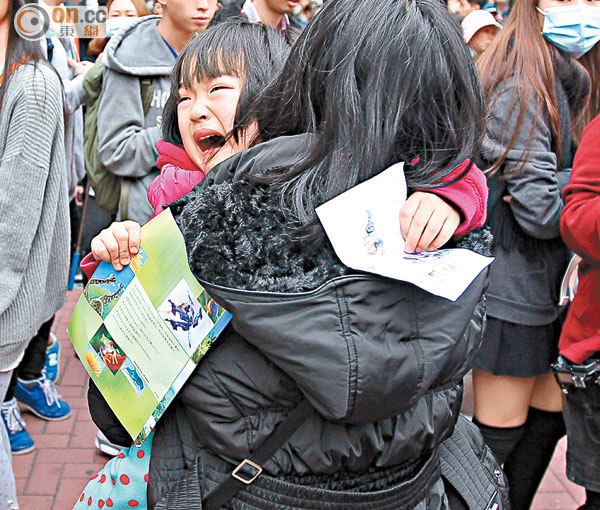
- Why protest at the school? As school
policy, the school is obliged to consider an applicant on the basis of
factors such as availability of space, residency (e.g. permission from
Immigration Department for temporary residence), mental/physical capacity,
educational achievement, etc. Do you think school admission decisions
should be made by the 50 yahoos are screaming about outside
the front gate?
- Once upon a time, the Professional
Teachers Union took the position that education is a universal value and a
basic human right. Therefore, the teachers will teach anyone who wants an
education irrespective of their residency status. Today, education is a
basic human right that is reserved only for children who are not mainland
locusts.
- A male passerby was annoyed by the
slogan-chanting in the street, and so he got into a verbal argument with
the Yellow Ribbon demonstrators. Guess what happened? The police came and
escorted the man away. Disturbing the peace is a crime in Hong Kong. But
the people who were disturbing the peace were allowed to continue, while
the lone objector was removed. What is this society coming to?
- Lu Xun wrote: When the strong
get
angry, they rise against those who are even stronger; when the weak
get angry,
they rise against those who are even weaker. Hong Kong Localism
Power/Civic Passion got angry, and they rose up against a little girl.
- The urgent task of the day is to find
the name of that little girl, who her parents are, where they live and
work, what their phone numbers are, etc and then we will see that justice
be served against her and her family.
- (Oriental
Daily) According to Hong Kong Localism Power spokesperson Mr.
Ho (no first name, please), the video proved that someone instructed the little girl to speak
louder and therefore he wondered if the whole thing was a staged act with
a little girl shedding fake tears.
- About this conspiracy theory over the
little girl, let's get the facts straight. On this day, Hong Kong Localism
Power/Civic Passion announced that they were going to lay siege
to legislator Chan Yuen-han's office in Wong Tai Sin. Chan said that she
was attending meetings in the Legco building. Her office workers were not
in, so the gates were locked. The demonstrators chanted a few slogans and
pasted some paper on the wall. As the Rolling Stones sang, "I
can't get no satisfaction." So they improvised and marched down to
the Confucian Tai Shing Primary School which nobody was aware of
previously. Now, how did the puppet masters know to prepare a child
actress to come out and shed tears beforehand? Nobody knew this was going
to happen, not even Hong Kong Localism Power/Civic Passion themselves.
- Nice try, but have you thought about the possibility that there are
moles within these organizations? How else can you explain the apparent
incompetence? The incompetence is so striking that it must have been sabotage.
- (TVB)
According to Hong Kong Localism Power spokesperson Mr. Ho (no first name,
please), "I think
those were fake tears. The eyes of many citizens are snow-clear. They can
determine whether those tears were fake or real. Why does a small child
love her school so much? I am perplexed why her initial reaction is to
cry, and then give such a speech? I don't get it." He also emphasized that
the demonstration was peaceful: "It was indeed peaceful. Certain Internet
users posted some papers, but we didn't do it. Anyway, we didn't post any
papers."
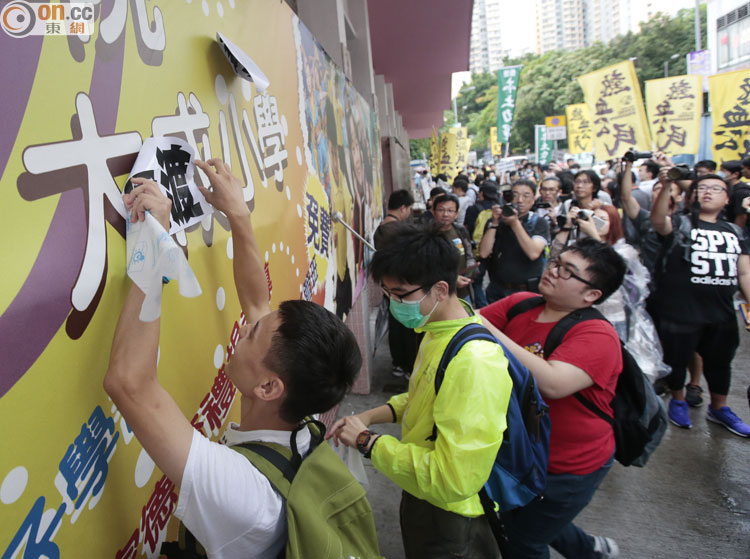
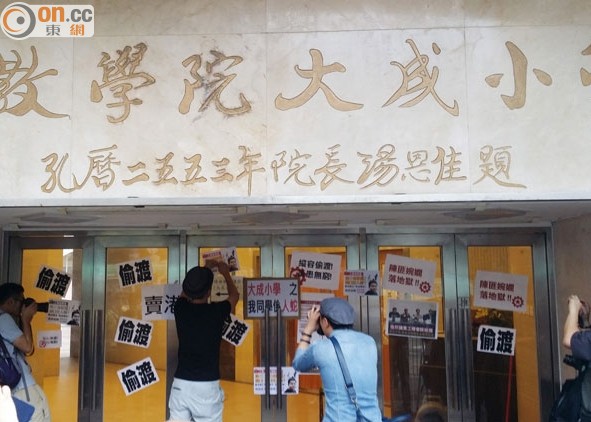
So who are these people pasting papers?
- (Speakout
HK)
0:08 Indigenous Power's Mr. Ho: Our action was peaceful. Our action was
indeed peaceful. Some Internet users posted some papers. We didn't paste
them. I didn't post them.
0:26 Indigenous Power's Ho Chi-kwong on radio: If during our resistance
our methods are too mild-mannered, then nobody will care about the matter
in the end.
1:02 Valiant Front spokesperson Mr. Ape: The demonstrators have to protect
themselves. If we divulge our true identities, then ... something ... us
... maybe political enemies will take revenge ... I am hiding in a men's
toilet to do this interview.
- Putting up posters on the wall is not a
crime against humanity. It is the exercise of freedom of expression.
- Putting up posters on the wall is a crime that is subject to a $1,500
fine in Hong Kong. There are similar local statutes all over the world.
Please do not mislead people.
- The greatest leaderless mass movement
of all times:
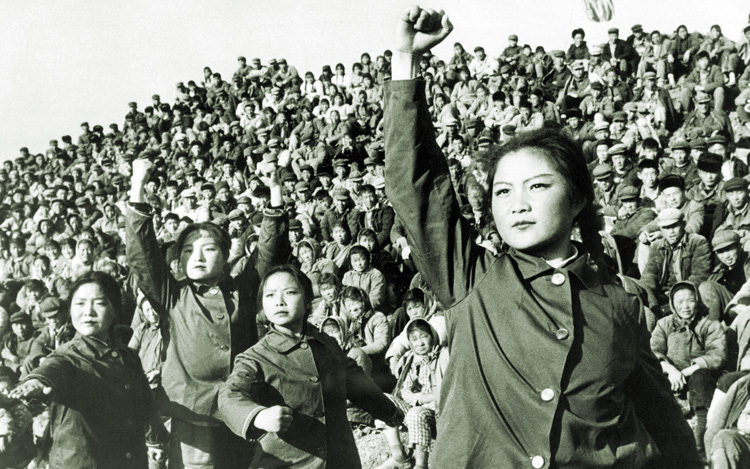
- Why can't you trust those
demonstrators?
(1) These dickheads have shifted their organization name from Hong Kong
Indigenous Front to Hong Kong Localism Power to Hong Kong Indigenous
Ideological Trend. This is like stock market listed companies registering
limited companies for specific projects in order the shield themselves
from liabilities. You do this when you know you are engaged in high-risk
activities.
(2) These dickheads don surgical masks. What is it about
freedom/democracy/human rights/universal suffrage/rule of law that
requires a supporter to shield his/her face?
(3) These dickheads say: "If you can't make a small child cry, you
shouldn't be in a resistance movement."
- Civic Party chief Alan Leong is
normally high on defending the rule of law and justice and condemning
violence. When the
Wen Wei Po reporter contacted him for comments, Leong said that
the Immigration Department should get the facts first and then proceed
according to the existing rules and principles. As for the sieges of Chan
Yuan-han's office and the Confucian Tai Shing Primary School, Leong said
that he "won't comment." As for Siu Yau-wai being fleshed out on the
Internet, Leong said that this is like other Internet bullying stories:
"This is not the first case, so I am not making any special comments as of
now."
(Oriental
Daily) May 22, 2015.
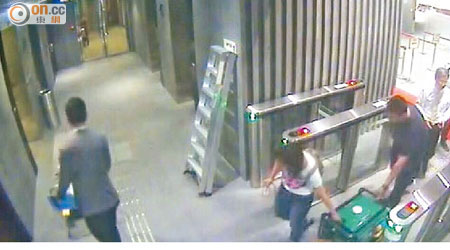
Yesterday around 430pm, four aides
to Civic Party legislator Kwok Ka-hi attempted to bring some items into the
Legislative Council. The items included a two-meter-tall metal ladder, an
electricity generator and two other carts carrying other items. The building
security guards were concerned that the electricity generator may contain
inflammable fuel and demanded the electricity generator be inspected. Kwok's
four aides refused to cooperate and called Kwok Ka-hi. Kwok came down from his
eighth floor office, told the security guards off and got his aides to move the
items inside his office. Later security guards detected the strong smell of
gasoline in the restroom and believed that someone had flushed the fuel down the
toilet.
When Kwok was interviewed, he said
that his aides had brought in a brand new electricity generator and that the
security guards were harassing his aides. But he acknowledged that it is
possible that the electricity generator may contain a small amount of fuel that
was used for testing purposes. He accused people of magnifying this trivial
matter. He said that if he was not allowed to bring gasoline into the
Legislative Building, then all cars must also be banned from the parking garage.
Internet comments:
- Electricity generator? Kwok Ka-ki
must be planning to occupy the Legislative Council from the inside and not from
the outside. Many pan-democrats have threatened Occupy tactics if the 2017 Chief
Executive reform bill should pass. If the Occupiers are brought into the
Legislative Council building as guests of the pan-democratic legislators, they
can erect barricades and set up booby-traps. If the police cut off electricity,
they will have their own electricity/water/food supply. They are just so smart
and valiant.
- If they won't let me bring
gasoline onto the airplane, then all airplanes must also be banned from the
airport because they carry lots of fuel.
- Electricity, water and food are
not the biggest needs during a takeover. The most important thing is an Internet
connection. What if the police cut off the Internet and mobile phone service in the vicinity? No
more posting of selfie photos onto Facebook! The occupiers will surrender within
24 hours.
- It is a violation of the privacy
of the four aides of Kwok Ka-hi to have the close-circuit television screen
capture published in the newspapers. A special Legco committee needs to be
formed immediately to investigate how this leak occurs.
- If the legislators say that they were elected to supervise/monitor the
government, then who is supervising/monitoring them? We the people, of course.
And we have the right to know what they are up to, especially when it comes to
possibly unlawful activities.
- Kwok Ka-ki is a medical doctor
whose specialty is urology. Therefore he needs a backup electricity generator in
his legislative council office in case the electricity fails during
circumcision operations. Very important, that.
- What do the environmentalists
have to say about flushing gasoline down the toilet? Will it help save the China
white dolphins? Will it make the Red Forests grow back?
- I know why Kwok Ka-ki did this!
He is using the electricity generator as the cover to smuggle gasoline in so
that he can set himself on fire!
- Wait a minute! Kwok said that
this was a brand new machine with no gasoline inside (other than some trace
amounts used during testing). The more interesting question is: What is the
purpose of an electricity generator without any fuel? This is like buying a
mobile telephone and removing the battery as unnecessary.
- What kind of news reporters are
these? Why don't they ask the most obvious question? ... "Legislator Kwok, what
do you plan to use the electricity generator for?"
- "No
matter what is the reason and background, the refusal to let security guards to
check is unreasonable. The security guards have a duty to ensure the safety of
everybody inside the building. Mr. Kwok's claim to not allow cars coming into
the building
is totally ridiculous. Flammable material inside a car park can burn the car and
ignite the fuel inside cars. Who will stay in the car park forever after
parking? As such, the risk to life is relatively low. However, an office block
has lots of decoration which can support and spread the fire. The people there
are heavily risked. Mr. Kwok, What is your profession? What is your duty being a
Legco member? You should be well aware of the risk than the others."
- This dickhead Kwok Ka-ki made a stupid analogy
between the office and the car park. You park your car inside a car park and not
inside your office, just as you defecate in your bathroom and not in your dining
room. But maybe Kwok does just that ...
- This is not the first time that a pan-democratic
legislator has done this sort of thing.
(The Sun)
November 22, 2014. Recently Democratic Party legislator Wu Chi-wai spent more
than $2,000 to purchase an electricity generator to use during events. He tested
the equipment inside his office. Unfortunately, the machine generated a foul
odor that spread across the floor, causing concerns that there was a fire. Wu
Chi-wai offered no apologies and only said that the machine has been sent out
for repairs.
- (Oriental
Daily) May 23, 2015.
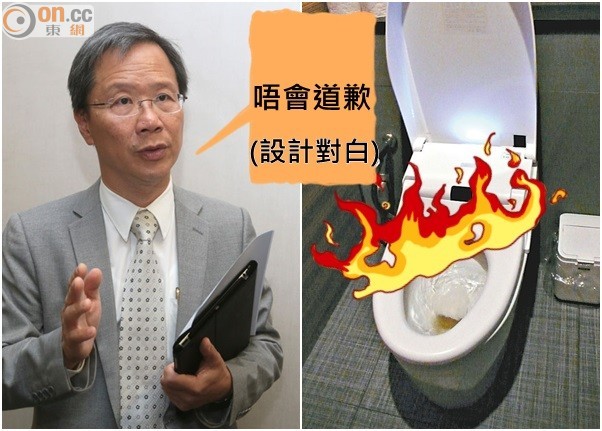
Polytechnic University Department of
Mechanical
Engineering engineer Lu Kok-keung said that bringing an electricity
generator
into the Legislative Council is not hazardous as such. However, gasoline
is an
inflammable liquid and the electrical generator should be kept faraway
from any
source of fire. If gasoline is poured down the toilet, any residue may
turn into
a fireball in the presence of a fire seed. Lu also found the act of
flushing
gasoline down the toilet to be incomprehensive. It is dangerous and
environmentally unsound. "Just pour the gasoline into a can and put it
into your
car's gas tank."
As for pan-democratic legislators using
electricity generators in their offices, Lu said that this is very dangerous
because the machine will generate enough carbon monoxide exhaust to kill someone
within half an hour in a closed room.
Meanwhile Kwok Ka-ki is still upset by the
invasion of the privacy of his aides. The Legislative Council secretariat
distributed the screen capture of the CCTV video to members of the
administrative/management committee which includes pro-establishment and
pro-democracy legislators. Who leaked the screen capture? That's anyone's guess. Besides, do
legislators have privacy any more?

(Oriental
Daily) May 22, 2015.
The Democratic Party held a
special central committee meeting last evening, and voted 21-1 to freeze the
membership of Nelson Wong who is advocating a signature campaign to support
"pocket it first". The decision is effective immediate and will continue for six
months. Wong becomes the first "frozen" party member in the history of the
Democratic Party.
Wong said that he completely
understands why Albert Ho Chun-yan made the motion, but he was sad about the
vote. He never imagined that an attempting to set up a civil platform would hurt
the party so much.
Wong said that he originally
proposed to turn the company votes into individual votes as well as allowing the
blank vote a veto vote. The central government has rejected these two ideas.
Therefore, Wong won't be starting his signature campaign.
Wong said that he respects the
party's decision, but he won't be resigning from the party. "My feelings for the
Democratic Party have not died off." The Democratic Party will investigate
Wong's case and decide whether to expel him or not.
Internet comments:
- The Democratic Party, the least
democratic of all parties. If they can't even deal with their own party issues
in a democratic manner, what should the voters trust them?
- The Democratic Party central committee took a vote with a result of 21-1. This
was a very democratic process.
- They disciplined Nelson Wong
because citizens may be unsure just where the Democratic Party stands. But
haven't they been arguing for so many years that universal suffrage can take
place now because the citizens are smart and know how to tell right from wrong?
- Nelson Wong wants to find a way
for the Democratic Party to reach out to the majority of the population, and he
now faces expulsion. His executioner
Albert Ho spends his meeting time in Legco on sexy photos. The good
sleep badly and the bad sleep well.
- So what if Nelson Wong's party
membership gets frozen? What's it to him? More importantly, will he get 5% off
at Cafe de Coral as a result? If not, he shouldn't care.
- If he goes to Fairwood, a 10% surcharge will be tagged onto his bill.
- The
Democratic
Party has 788 members. Since that is more than the 689 Chief Executive
election committee votes that CY Leung got, they are more representative and can
therefore decide the democratic future of Hong Kong shall be continued with Chief
Executive election by 1,200 persons.
- The episode of the
Eight-Nation Alliance showed that the Chinese people are best in the
world with internal strife/internecine struggle, allowing a numerically inferior
foreign force to whip their ass.
- (The
Free Dictionary) Party Discipline
Lenin emphasized that iron party
discipline becomes particularly important in the period of the working class
armed struggle to achieve power and defend and consolidate it. The Communist
Party can successfully fulfill its role as leader of the toiling masses if
strong, conscious party discipline prevails and if the party’s directing center
is an authoritative body that has broad powers and enjoys universal confidence
among party members and the nonparty toiling masses.
...
The principles of party discipline
of the CPSU are embodied in the Rules of the CPSU, which state: “Ideological and
organizational unity, the monolithic quality of the ranks of the party, and the
elevated, conscious discipline of all Communists constitute an inviolable law in
the life of the CPSU. Every manifestation of factionalism and cliquishness is
incompatible with the Marxist-Leninist party spirit, with continued membership
in the party” (1971, p. 5). A party member is obligated to defend party
unity—the chief prerequisite for party strength and power—in every way possible
and to observe party arid state discipline. Those guilty of violating the
Program and Rules of the party, party discipline, state discipline, or party
morality must answer to the party. A Communist is an active, selfless fighter
for the implementation of party and state decisions. For the party member, mere
agreement with party resolutions is not enough: he is obligated to struggle and
put these resolutions into practice.
- Democratic Party chairwoman
Emily Lau characterized the Nelson Wong affair as an intra-party matter that
does not concern the citizens. But what Nelson Wong brought up was something
that the majority of the citizens want. Of course, Emily Lau doesn't care -- she
only wants to impose the will of the Democratic Party on the people, just like
what the dictatorial Communists do.
- (HKG
Pao) The Democratic Party central committee voted 21-to-1 to suspend
Nelson Wong's party membership. The interesting question is just who that lone
dissenter was. Wong is not a member of the central committee, so he was not that
person. Since the voting was anonymous, nobody knows for sure who that person
is. One thing for sure was that it was not Albert Ho because he made the motion to hold
the vote (unless he has split personality).
- (SCMP)
May 23, 2015.
Like Woody Allen, I prefer under-confident
people. Coupled with real-life experience and native intelligence, such
individuals are least likely to become fanatical or intransigent. In an age
where people are so sure of themselves they are ready to kill others, I am
all for self-doubt and uncertainty.
This does not mean under-confident people
don't have their own views. It's just that they are ready to change their
perspectives and positions in light of emerging new facts and circumstances.
Changing your mind does not make you unscrupulous or lack principle. In
fact, it takes more courage and integrity than it is to being unyielding,
self-righteous and obdurate by insisting you alone know the truth, or what
is right or that you are on the right side of history.
As it is with people, so it is with
political parties. I don't hold it against the Democratic Party that one of
their stewards have dissented from the party line and advocated lawmakers to
pass the government's reform package on universal suffrage.
I share democrat rebel Nelson Wong
Sing-chi's position but I also respect the pan-democrats' rejection. Still,
I find it shocking that his party led by chairwoman Emily Lau Wai-hing is
going Stalinist on Wong.
The plan is to excommunicate and then expel
him from the party. Why? For speaking his mind? I don't see how a party that
has been at the forefront of the democratic movement since the 1980s should
be so intolerant of dissent.
Lau said party discipline needed to be
restored. By punishing Wong, Lau said, "we are sending out a very clear and
unambiguous message where the Democratic Party stands in the question of
constitutional reform."
Frankly, I don't understand how Wong's
dissent might have distorted the party's public stance on the government's
reform package. All it shows is that it has independent and thinking party
members who might not always follow the party line.
The public is not confused by Wong. Rather
it's Lau's Stalinism that some people find disconcerting, not Wong's
dissent.
Political parties should, by definition,
have a party line. This does not mean its members must adhere strictly to it
- unless, of course, you are talking about the Chinese Communist Party.
- (SCMP)
June 13, 2015.
Former lawmaker Nelson Wong Sing-chi has
accused some of his Democratic Party colleagues of being "unethical, unfair
and disrespectful" even as he faces expulsion for going against the party's
line over the government's political reform plan. Wong was adamant about
staying in the party, telling reporters yesterday he would not quit on his
own initiative.
"If I were to go, few are actually
qualified to stay behind," he said alongside fellow Democrat dissident Tik
Chi-yuen, who also backs the blueprint for the 2017 chief executive poll
days ahead of a critical legislative vote on it.
In the latest twist to the infighting
within the party, Wong further questioned why party chairwoman and lawmaker
Emily Lau Wai-hing took no action to find out who had leaked details of his
case to the media.
"As a political party that claims to
protect human rights and safeguards the rule of law, the central committee
of the Democratic Party ought to reflect on why there are such acts that
violate privacy protection and trample on the rights of others," he said.
Wong sparked controversy last month when he
announced plans for a petition urging lawmakers to accept the government
reform plan should officials make two concessions - including a so-called
"none-of-the-above" option for the public ballot and abolishing corporate
voting in electing members of the committee that would nominate chief
executive candidates. All 27 pan-democratic lawmakers have vowed to vote
against the package because it fails to give Hongkongers a genuine choice of
candidates. They argue that nomination restrictions imposed by Beijing will
screen out critical candidates.
Wong defended his stance during a party
disciplinary hearing, saying he should enjoy "relatively broad room for
expression", given his status as an ordinary member. Nevertheless, he was
expelled from the party's central committee and had his membership suspended
for six months in an unprecedented response from his colleagues.
The party's disciplinary committee has
recommended that its decision-making body should expel him, according to
sources. Wong criticised those who leaked the recommendation as "unethical,
unfair and disrespectful". He also vowed to continue pressing for public
support for the government proposal, suggesting opening up more nominating
committee seats to election by individuals.
- (RTHK)
July 17, 2015.
Nelson Wong has been expelled from the
Democratic Party for publicly calling on pan-democratic lawmakers to accept
the government's political reform package.
Mr Wong, one of the party's founding members,
sparked controversy in May when he urged lawmakers to accept the reform
package if the central government agreed to make concessions. In the end, the
government's electoral reform proposals were voted down in the Legislative
Council by the pan-democrats last month. But the Democratic Party accused Mr
Wong of damaging the party's reputation. And members of the party's
disciplinary committee voted 17-7 on Thursday night to expell him.
Mr Wong expressed his disappointment at the
vote, saying he found the committee's decision unbelievable. Under the rules
of the Democratic Party, he could seek to have the decision overturned. But Mr
Wong said it was pointless to do that now.

(Oriental
daily) May 19, 2015.
During the Occupy period, a number
of pan-democratic legislators have been inviting demonstrators to visit them as
guests and use the conference rooms as bedrooms. Last month, Labor Party
legislator Peter Cheung Kwok-che's assistant brought a demonstrator upstairs to
use a supermarket cart to carry more than a dozen hot water bottles into the
building to re-fill them. Labor Party legislator Cyd Ho Sau-lan's assistant then
escorted this demonstrator out of the building with the supermarket cart. The
Legislative Council secretariat said that the two legislators are guilty of
three things: allowing a visitor to roam around not in the company of a
legislator; using Legco resources for unlawful purposes; allowing stolen
property (namely, the supermarket handcart which is clearly marked with the name
of the said supermarket) onto the premises.
Labor Party legislator Peter
Cheung Kwok-che replied: "What is wrong with helping people out? They didn't
come in and cause trouble." He did not think that the Legislative Council should
be so miserly. He said that he will continue to bring people inside the Legco
building. However he acknowledged that the secretariat "may be justified."
Meanwhile Labor Party legislator Cyd Ho Sau-lan admitted that she has received a
warning letter from the secretariat, but declined to comment on the contents of
that letter.
Internet comments:
- If I were pushing a supermarket
shopping cart anywhere else (e.g. Hong Kong International Airport, Four Seasons
Hotel, Hong Kong Cultural Centre, ifc2, etc), I would be arrested for theft of
private property immediately.

(Wen
Wei Po) May 20, 2015.
At around 1pm while the
pan-democratic legislators were busy filibustering, the fire alarm in the
Legislative Council building went off. Chairman Jasper Tsang suspended the
meeting as the legislators evacuated down to the lobby.
People Power legislator Chan Wai-yip
said: "The heavens are helping me on the filibustering." At the time, Civic
Party legislator Chan Ka-lok was saying to himself: "I must been making such a
fiery speech that the alarm went off." Labor Party legislator Lee Cheuk-yan told
Chan: "You should have been shooting fire when you spoke, so that we have to be
evacuated."
The firemen arrived four minutes
later. They did not detect any sign of fire. The Legco session resumed at 150pm.
DAB legislator Steven Ho
commented: "Where is 'Long Hair' Leung Kwok-hung? Did he sneak out to smoke and
triggered off the alarm?"
In May 20143, a sofa inside Leung
Kwok-hung's 10th floor office of the Legislative Council building caught fire.
The smoke caused the automatic sprinkler system to turn on and put out the fire.
A number of legislators' offices were soaked in water. The firemen came and
found a lighter and ash try inside Leung's office. The police suspected that
someone was smoking in violation of the no-smoking policy inside the Legislative
Council building. At the time, Leung said that although he was a smoker, he
would "absolutely not" smoke inside the building.
Internet comments:
- Setting off a fire alarm is a
standard way to stop a meeting. The risk is that there are close-circuit
television cameras everywhere in this building and you could be filmed. Another
standard way is to call in a bomb threat. The risk is that the police may be
able to trace the phone call. So you should use an anonymous phone card on a
non-smart phone (i.e. no GPS function) and discard the card immediately
afterwards.
- Why is smoking so dangerous?
Imagine this scenario. Kwok Ka-ki's aides flushed gasoline down the toilet to
destroy evidence. Leung Kwok-hung comes into the restroom, smokes a cigarette
and tosses the butt into the toilet. KABOOM!!! (Reference:
2014 Kaohsiung gas explosions)

(TVB
News) May 19, 2015.
The government intends to present
the constitutional reform bill to the Legislative Council before the summer
break. Scholarism member Agnes Chow Ting said on the TVB English-language
program
Straight Talk that they will protest peaceably during the debate period.
But if the bill is passed, then some people may destroy government property. She
does not exclude the possibility of a second round of the Occupy movement.
Chow said: "I cannot make any
guarantees, because I cannot control all those who participate in the
demonstrations. But I can say that non-violence is more effective than violence
in the quest for democracy, as in our participation in the civil disobedience
movement. If someone goes and destroys businesses or private properties, then I
don't think that is too reasonable. But if under some extreme circumstances
wherein they cannot change the whole policy or reform the whole system and they
go and destroy some government properties, I think that such action is sometimes
reasonable."
Previously, the Civil Human Rights
Front had said on the same program that they will call for the 100,000 persons
to surround the Legislative Council building before and after the vote on the
constitutional reform bill. Hong Kong Federation of Students secretary-general
Nathan Law also said that they will attack the Legislative Council building if
the bill gets passed.
Internet comments:
- So what
if they destroy more public property? They occupied for 79 days and they did not
even gain one pubic hair out of it. And they won't get anything even if they repeat
this in
an infinite loop. What can they do now?
- If you're
so upset, then why not start with smashing your 60-inch television set at home?
your Macbook? your iPhone6+? your rice cooker? your toilet seat? ...
- If I were the Hong Kong
government, I would hold the police back and let the demonstrators burn the
Legislative Council building down. For reference, see the
Reichstag
fire, an event that was pivotal in the rise of the Nazis in Germany.
Such an event with give rise to a Law-and-Order Party. It's easy -- all one has
to do is to dig up the old
Spiro Agnew
speeches.
- Agnes Chow wants the best of
both worlds. On one hand, she uses the threat of violence to intimidate. On the
other hand, she says that she does not condone such violence but sadly she
cannot control the violent elements.
- Agnes Chow is imitating what
extortionists say in movies. "If you don't fork over the money each month, then
I cannot exclude the possibility that your store may be smashed." Her position
is weakened considerably because it is also true that: "Even if you fork over
the money each month, I still cannot exclude the possibility that your store may
be smashed. That's because I cannot control everybody in the neighborhood."
- In summary, if the Legislative
Council passes the bill, then it becomes reasonable and justifiable to smash
some government property. Why? Why are you asking why? Scholarism has spoken and
you should just STFU.
- Why stop at smashing some
government property? The taxpayers will pay for the repair work. That's all. You
need more drastic actions to get your point across.
Occupy? Been there,
did that, didn't work.
Hunger strike? Been
there, did that, didn't work.
Lay siege to government
buildings? Been there, did that, didn't work.
The
remaining items in the standard toolbox are:
Hostage-taking (see
Aldo Moro,
Munich
massacre)
Bombings (see
2013 Boston Marathon,
2013 Tiananmen Square,
2005 London,
1995 Oklahoma City,
1995 Tokyo sarin,
1983 Beirut,
1967 Hong Kong leftist riots)
Self-immolation (see
Tibetans in China)
Assassination (see
Abraham Lincoln,
Archduke Franz Ferdinand of Austria,
Lam Bun,
Rajiv Gandhi)
Armed insurrection (see
Xinhai
Revolution)
Foreign intervention (see
Vietnam War,
Contras)
Take your
pick. Good luck.
- Agnes
Chow? Laying siege to the Legislative Council building? The last time around
during Occupy Central, Agnes Chow resigned as Scholarism spokesperson because
"the pressure was too much." Now she has popped up again to do television talk
shows. But when the action starts again, she is going to say that "the pressure is
too much" and disappear again, leaving only the remaining fools to be clubbed on
their heads by
police batons.
- Agnes Chow disappeared during the first Occupy movement? I do not exclude the
possibility that she may disappear during the second Occupy movement.
- "Something has come up suddenly, so I'll have to go now. Meanwhile you guys go
ahead and charge the police without me. I'll be watching the live television
coverage on my iPhone6+. You have my moral support. God bless you all!"
- Don't be so rough on Agnes Chow. Near the end of the first Occupy movement,
she left in order to catch up on her university studies and study for the exams.
For the second Occupy movement, she'll be on summer vacation and therefore can
dedicate herself to being clubbed on the head by police batons as well as giving
television interviews.
- Al Qaeda
hijacked jetliners to ram the Twin Towers and the Pentagon. Agnes Chow can only
manage to fold paper airplanes to throw at the Legislative Council building. The
rest of her standard-issue Yellow Ribbon tools are: drawing graffiti; waving umbrellas;
singing Beyond songs; pushing at
the iron barricades; screaming at the police for being shameless; spitting at
the police; throwing garbage onto the roads; indefinite relay hunger strike with
each team members participating four hours at a time; screaming "sexual molestation!";
...
- "If
under some extreme circumstances wherein they cannot change the whole policy or
reform the whole system and they go and destroy some government properties, I
think that such action is sometimes reasonable." So if I don't like some
government policy, then it is reasonable for me to go out and destroy some
government properties. Yes, I like that ...
- If I don't like what Wong Yeung-tat said, it is reasonable for me to smash the
Civic Passion office.
- If I don't like what Agnes Chow said, it is reasonable for me to bash Joshua
Wong's face in.
- If I don't like what Joshua Wong said, it is reasonable for me to re-arrange
Agnes Chow's face.
- Hong Kong Federation of
Students' Law37 threatens to attack the Legislative Council building if the bill
gets passed? Half of the student unions have voted to withdraw from the
Federation already. Who can Law37 call on?
- When they attack the Legislative
Council building this time, will Joshua Wong and other student leaders be hiding
inside the building as guests, watching television coverage and eating instant
noodles like last time?
- Hongkongers are frogs trapped at
the bottom of a well. They cannot see past their noses. If they have grand
vision, then they should know that if the bill is passed, it won't do much good
to break some windows in the Legco building. Instead, they should march up to Zhongnanhai and fight
the Chinese Communist grandpas themselves.
- I thought Chow Ting went to
England. Is she back now?
- No, you are confusing Crystal Chow Ching with Agnes Chow Ting. Their names may
be similar, but their looks and figures couldn't be more different.
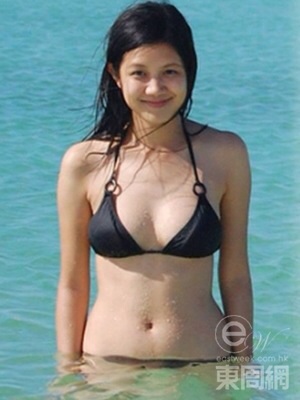
Crystal Chow Ching
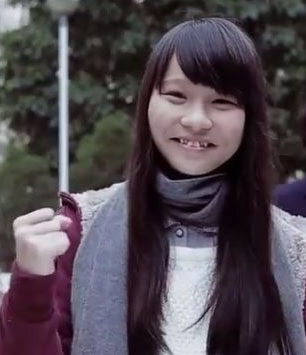
Agnes Chow Ting
Background:
The Case of Wat Wing-yin.
(Ming Pao via
Speakout HK) May 19, 2015. You should break up if you don't share your
views. By Wat Wing-yin.
Yesterday, Ming Pao continued to
hype up the case of the murdered dog-walking old man in Sha Tin. The front cover
photo was titled "Mentally impaired persons stood out in the rain." The banner
in the photo read: "Bullying the weak and vulnerable, the people are angry."
Suddenly, I felt the same way.
I am a little woman. I have been
writing newspaper columns for many years. I write what I want to write. I am not
employed by anyone person or organization. That is because I am dissatisfied
with plenty of things. That is because I write what I believe. That is because
nobody else dares to say these things. Most of all, that is because the silent
majority is accustomed to accept things. In these times, I write about the
injustices and absurdities that I saw.
As a result, the attacks against
me have never ceased. Even some media worker friends say that I am "a paid
cultural prostitute." I did not 'unfriend' them and I have never tried to
clarify things. In this world, we can no longer persuade each other. But I still
have a question: How come your beliefs are called beliefs whereas my beliefs are
just paid for?
Last week, my entire family
received death threats. Someone even posted my home address onto Facebook. The
bullying has turned into violence. When I say something that they don't like,
they want to exterminate my whole family. Please tell me, where has our freedom
of speech gone?
The Journalists Association and
the politicians frequently speak on behalf of those whose freedom of expression
is threatened. Over the past year, my essays have been subject to intimidation
and threats, but those people have never said anything. So freedom of expression
is in fact a special Yellow Ribbon privilege.
At the same time when I was
attacked on the Internet, Ming Pao (where I write a column) chimed in and
stirred trouble over the past several days while naming me.
I can see that our paths have
diverged.
In 2012, then Ming Pao
chief-editor Kevin Lau Chun-to invited me to join Ming Pao. He said that he
wanted to bring out reforms. Their readers are getting old, and they needed to
compete with Apple Daily to compete for young readers. I had no intention of
being a hatchet man, so I declined the Mr. Lau's offer.
Today, Ming Pao looks like the
shadow of Apple Daily. I can only say: I have no regrets in abandoning it.
Dear readers, I thank you for your
constant support. I remember that you often write to say that you won't be
reading Ming Pao if I wasn't there. I think that it is time. Just as we will use
our votes to punish the political hacks, we should not forget to withhold our
daily 7 dollars to punish the poisonous newspapers.
This is my last piece. I don't
want to write anymore. I am ashamed to be on the Ming Pao team. That is all I
have to say!
(Sina.com.hk)
May 20, 2015.
According to information, Wat
Wing-yin did not notify the Ming Pao management that she would stop writing her
column. The Ming Pao management only found out when they read her column. But
when the editors and reporters heard the news, there was "cheering and
applauding." According to information, Ming Pao intends to invite Carmen Poon to
replace Wat's column. Poon was an aide in CY Leung's Chief Executive election
campaign, and Ming Pao wants to hire someone close to Wat's views.
Meanwhile, former chief editor
Kevin Lau said that she must have misunderstood what he told her in 2012 about turning Ming Pao into
another Apple Daily. He said he meant to say a "youth-oriented newspapers" but
she thought that meant Apple Daily.
Internet comments:
- The longer the Journalists
Association maintain their deafening silence, the more Wat Wing-yin's assertion
that freedom of expression is a special Yellow Ribbon privilege rings true.
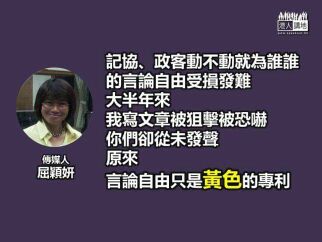
- According to the
Chinese University of Hong Kong Centre for Communication and Public Opinion
Survey, the public trust rankings of the major newspaper in Hong Kong
are:
| |
1997 |
2001 |
2006 |
2009 |
2010 |
2013 |
| SCMP |
1 |
3 |
1 |
1 |
1 |
1 |
| Economic Times |
4 |
5 |
4 |
4 |
3 |
2 |
| Ming Pao |
2 |
1 |
2 |
2 |
2 |
3 |
| The Standard |
3 |
6 |
5 |
3 |
6 |
4 |
| Economic Journal |
6 |
2 |
3 |
6 |
4 |
5 |
| Sing Tao |
5 |
4 |
6 |
5 |
5 |
6 |
| Headline Daily |
- |
- |
11 |
8 |
7 |
7 |
| Oriental Daily |
7 |
11 |
9 |
11 |
9 |
8 |
| AM 730 |
- |
- |
12 |
9 |
10 |
9 |
| ... |
|
|
|
|
|
|
| Apple Daily |
9 |
14 |
14 |
14 |
15 |
17 |
| ... |
|
|
|
|
|
|
| Sharp Daily |
- |
- |
- |
- |
- |
21 |
Given that Apple Daily is dropping
like a rock in public trust, Kevin Lau and Ming Pao will have to drop a whole
lot faster to catch up.
- (Markerting
Interactive) July 1, 2014.
Ming Pao’s
chief editor Chun To Lau has been removed from his role and handed a new
position in the publication.
The newspaper released a statement saying
the decision was made “to cope with Ming Pao’s new business
structure”. “Lau will take on important responsibilities in his new
position and will continue to generate new business for the
publication.” It went on to say that Ming Pao’s chief editor
spot has gone through several shuffles but its editorial policy will
stay consistent.Lau expressed on
Ming Pao that he has no intention to leave the group and has
already set himself about preparing to take on the new position.
Reacting to Lau’s abrupt departure, Ming Pao editorial team is
now working on a joint statement to express their shock and require for
an explanation from the management team. Lau, the chief editor of
Ming Pao since 2012, is reported to be succeeded by a journalist
from Malaysia, according to Wei Ling Li, the host of Commercial Radio
show The Tipping Point.
Speculation about his new role centred
around coverage of the free-to-air TV licensing saga with HKTV. Since
the licensing spat erupted on 15 October last year, Ming Pao
led with the news for nine straight days. In total, the licensing saga
occupied the newspaper’s headline for 15 days in a month.
Coincidently, a few days before Lau’s
relocation, Ming Pao fell from second to third place in this
year’s media credibility survey conducted by Chinese University. Out of
22 local print media, Ming Pao was edged out by Hong Kong
Economic Times, which has gained number one spot in media
credibility among Chinese newspapers.
Perry Mak, managing director and
executive director of Hong Kong Economic Times, said: “Each
newspaper has her own stance and principle about how to allocate her
editorial resources. Overall speaking, we believe Ming Pao
strives for the benefit of readers and it’s best for her readers to
judge.”
“We always put the benefits of Hong
Kong people and sustainability of Hong Kong economy top of mind. As many
HKET readers commented during our regular surveys, they favour
reading HKET due to our unbiased news reports,” he added.
Ivan Tong, editor-in-chief of The
Standard, the English-language newspaper which closely ranked
following Ming Pao as the forth this year, said it is normal
for a overwhelming reports on the recent HKTV saga as it is the most
talked-about topic. “It is okay to report overwhelmingly on the topic
that the public care most about, as long as the articles can maintain
neutrality.” Instead, he expressed concern over the declining public
trust to the media in general. “The study is a creditable one since
1997, but recently the trust in the media saw a big slip mainly due to
the emerging internet news, which is known for its lack of accuracy,”
Tong said.
Tong added that Hong Kongers have a
tendency to trust English-language publication over Chinese-language
media, which may partly explain the high-ranking for both SCMP
and The Standard.
The full result on print media from the report:
Public Evaluation on Media Credibility 2013.
1 South China Morning Post
2 Hong Kong Economic Times
3 Ming Pao
4 The Standard
5 Hong Kong Economic Journal
6 Singtao Daily
7 Headline Daily
8 Oriental Daily
9 Am730
10 House News
11 Sing Pao
12 Metro Daily
13 Hong Kong Daily News
14 Sky Post
15 Hong Kong Commercial Daily
16 The Sun (Hong Kong)
17 Apple Daily
18 New Evening Post
19 Wen Wei Po
20 Ta Kung Pao
21 Sharp Daily
22 Tin Tin Daily News*
(SCMP)
January 3, 2014.
... There was worse news for Ming Pao,
which had advertised itself as the city's most credible Chinese-language
newspaper after finishing second to the Post in previous surveys.
It slipped to third out of the 22 newspapers studied with a score of 6.74,
just behind the 6.78 for the Economic Times, and will change its
masthead slogan from today.
"The masthead is based on Chinese
University's poll and also encapsulates the newspaper's belief and
mission, and the goal we strive for every day," the newspaper said in a
statement. "We will … continue to remind ourselves to be professional in
our reporting."
CREDIBILITY RANKINGS (2013):
Electronic Media
1 RTHK 6.99 points
2 Commercial Radio 6.48
3 Cable News 6.38
4 TVB 6.25
5 Now TV 6.14
6 Metro Radio 5.92
7 HKBN bbTV 5.74
8 ATV 4.74
Print Media
1 South China Morning Post 6.98
2 Hong Kong Economic Times 6.78
3 MingPao 6.74
4 The Standard 6.71
5 Hong Kong Economic Journal 6.46
6 Singtao Daily 6.42
7 Headline Daily 5.87
8 Oriental Daily 5.85
9 Am730 5.82
10 House News 5.76
11 SingPao 5.75
12 Metro Daily 5.71
13 Hong Kong Daily News 5.46
14 Sky Post 5.44
15 Hong Kong Commercial Daily 5.21
16 The Sun (Hong Kong) 5.15
17 Apple Daily 4.98
18 New Evening Post 4.94
19 Wen Wei Po 4.89
20 Ta Kung Pao 4.68
21 Sharp Daily 4.46
- Why would you trust Ming Pao
any? For evidence, I cite the coverage of (A) the case of the murdered
dog-walking old man and (B) the disruption of the student debate competition.
The Ming Pao coverage is completely out of proportion.
- Who do you think jumps out to
pile on Wat Wing-yin?
Albert Cheng. He accused Wat of having the mentality of a slave. When
Albert Cheng says something, the opposite is likely to be true:
--- He claimed that the Chinese Communists fired him from his radio host spot,
then the Chinese Communists gives him a license to operate the dbc digital radio
channel.
--- He claimed that he is irreconciliably opposed to the Chinese Communists, but
he invited a whole bunch of National People's Congress delegates and Chinese
People's Political Consultative Conference delegates to invest and join the
board of directors of dbc.
--- He claimed to have been persecuted by the Chinese Communists, but the
Chinese Communists awarded him a Golden Bauhinia Medal.
- Times have changed.
Once upon a time, schools were educational institutions. Nowadays, schools are
diploma mills.
Once upon a time, teachers taught students. Nowadays, teachers are salespersons.
Once upon a time, journalists practiced journalism. Nowadays, journalists are
fiction writers.
Once upon a time, legislators legislated laws. Nowadays, legislators filibuster
the passage of laws.
Once upon a time, police arrested lawbreakers. Nowadays lawbreakers lay siege to
police stations.
- Wat Wing-yin is popular because
what she says is simple, direct and obvious. Here is a summary of her latest
column in
Sky Post:
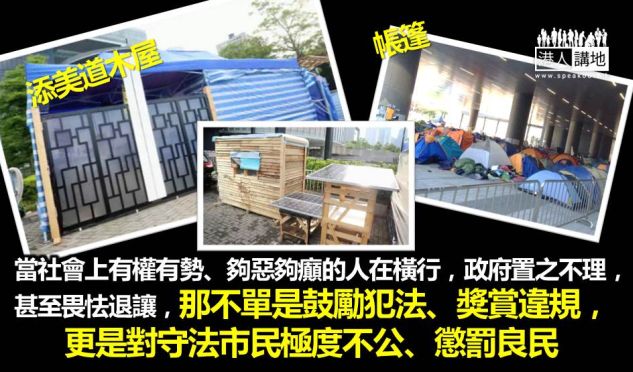
Case#1: A little old lady sets up
a food stall in front of a shuttered store. The Food and Environmental Hygiene
Department inspectors came and confiscated her vegetables because she is
unlicensed.
Case#2: A friend's air conditioner dripped water onto the street. The Food and
Environmental Hygiene inspector tracked down the source of the water puddle on
the ground and issued him a fine.
Case #3: A friend erected a shed on his roof to grow vegetables. The Buildings
Department came and ordered him to remove the illegal structure. All the
protests and appeals were in vain.
These are common ways in which
citizens cross government departments who enforce existing laws on food,
environmental hygiene, buildings, etc.
So why do we have a village of
illegal structures on Tim Mei Avenue? They pose hazards to environmental hygiene
and personal safety. Why is it that every government department (from the police
department, the food and environmental department, the environmental bureau, the
food and health bureau, the department of health, the environmental protection
department, the buildings department, the home affairs department, the transport
and housing bureau, etc) all say that this matter is not within their
jurisdiction?
Why is the government so good is
chasing after individual citizens for minor infractions, but so bad in pursuing
an obvious case against some Democracy Hegemons?
- Je suis Chris Wat Wing-yin
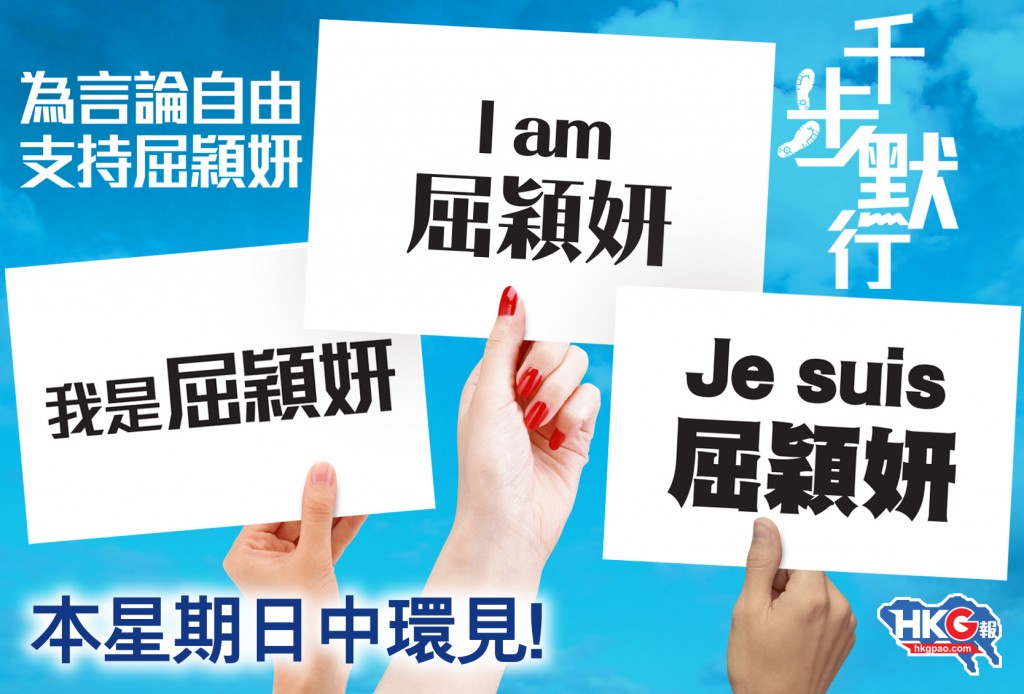
(Apple
Daily) May 22, 2015.
Today, the Ming Pao's Editorial
Room Notes responded to Wat Wing-yin. They cited the case of an oyster whose
taste depends on where it grew up. "A few drops of lemon drops cannot hide the
stench. Indeed, we have no regrets in losing her."
(HKG
Pao) May 23, 2015.
Yesterday Chris Wat
Wing-yin's husband and media veteran Lam Chiu-wing also announced that he is
discontinuing his Ming Pao column. He wrote: "It is commonplace for an essay to
draw criticisms due to differences in opinions. But this time there were death
threats against the family ... Tam Tak-chi said that he is going to bring people
around to surround my house, and say hello to the my three daughters ... Also
some reporters are continuing to provoke, quote out of context, set fires
everywhere." He said: "As public commentary becomes more vicious so that
viciousness become normalized, it is appropriate that when a woman fights alone,
a man should look after her back and proceed together." He also said that when
some media come across a dissident view, they will make accusations of "for
payment" and "cultural thugs".
(Oriental
Daily) May 17, 2015.
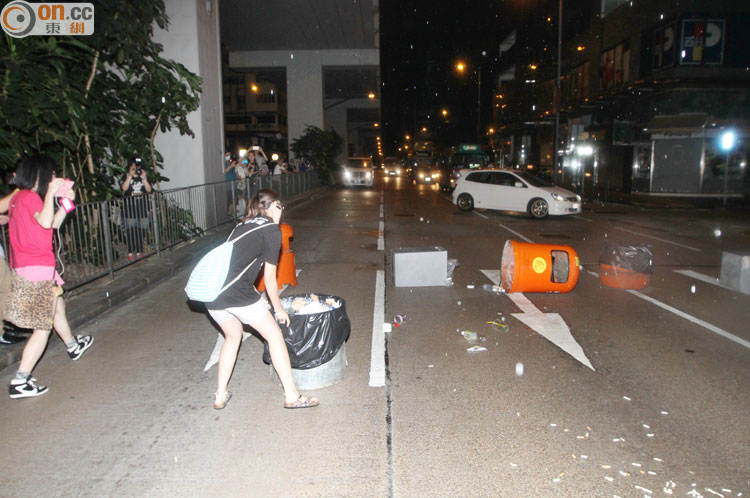
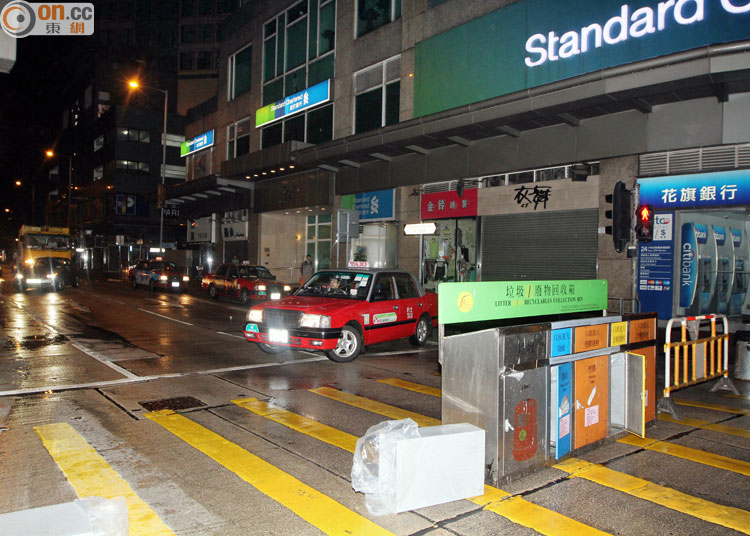
At around 930pm, a group of
Shopping Revolutionaries were gathered near the intersection of Shan Tung Street
and Nathan Road. Another group of counter-Shopping Revolutionaries were present
as well. Suddenly a 56-year-old man dashed onto the roadway. Patrolling police
officers spotted this man, and took him back onto the sidewalk. Suddenly a
61-year-old man kicked this 56-year-old man from behind. The police arrested the
61-year-old man and took him back to the Mong Kok police station. They also sent
the 56-year-old man for treatment at the hospital.
At around 1am, more than 50
persons surrounded the Mong Kok police station and demanded the release of the
arrestee. The police lowered the station gates. During this time, someone began
moving garbage cans onto the roadway to block traffic on Prince Edward Road
West. The police came out and cleared the road.
At around 2:45pm, a 45-year-old
man went by the intersection of Prince Edward Road West and Nathan Road. When he
saw the road blocks, he complained to those responsible. Two men wearing
surgical masks charged at him. The 45-year-old man turned and fled. He was
chased by the two men at Number 33 Tai Nan Street, and attacked with hard
objects. He sustained injuries on his head and elbow. The perpetrators were able
to escape. The victim called the police who took him to the hospital for
treatment.
(Cable
TV) At 0:21 of this video, there is a clear shot of the woman in the
black t-shirt moving a garbage can onto the roadway. She is beaming a huge
smile and really proud of her accomplishment of the day. Yes! Another huge
triumph for democracy in Hong Kong!
(Video)
https://www.youtube.com/watch?v=jOwozeaxyA0 (TMHK) Banging on the metal gate
at Mong Kok police station. Lots of people talking, impossible to make out most
of what they are saying except for the occasional "Your mother's stinking cunt".
(Video)
https://www.youtube.com/watch?v=E7LIsFEE9F0 (TVB) People dumping garbage on
the roadway, the police removing it, people putting it back, the police removing
it, people running on the street ...
Internet comments:
- I read this at a discussion
forum. I wasn't sure whether this was breaking news or an old story. But I am
beginning to appreciate what Karl Marx said: "History repeats itself, first as
tragedy, second as farce."
- The press coverage is biased.
The report says "50 citizens." The correct characterization should be "50
troublemakers."
-
黑社會曬馬
= Triad gang in a show of force.
- On August 8, 2006, Sun Yee On
boss Lee Tai-lung and more than 60 followers surrounded the Tsim Sha Tsui police
station because he learned that the police was going to interview a witness to
an earlier fight between
Sun Yee On
and Wo
Shing Wo. The police arrested 64 persons that night. Back then the Hong
Kong police will not tolerate any semblance of laying siege to a police station.
Things are clearly different now, because 'pro-democracy activists' are more
powerful and threatening than triad gangsters.
- Triad gangs usually have some
"turf" (such as brothels, gambling dens, bars in which they sell illegal drugs,
etc) where the police can cause trouble (e.g. hourly "inspections"). Therefore,
it is like a formal dance in which the police and triad gangs have certain
understandings about what is beyond the pale.
- The police and the shopping revolutionaries are also holding a formal dance
with certain understandings. Thus, the shopping revolutionaries know that they
can gather outside a police station but they must not attempt to storm inside.
They know that can toss garbage cans onto the roadway, but must let the police
remove the obstacles.
- Triads are at least useful to
society because they provide consumption and employment. Shopping
Revolutionaries are completely useless with no discernible contribution to
society.
- Why should the police arrest
these people, knowing full well that the magistrates will come up all sorts of
fantastical excuses (e.g. ageism, autism, contrition, etc) to release the perps?
- The Hong Kong police do not
match up to international standards. Do you see the Ferguson police station
being surrounded?
(Speakout
HK) By Fung Wai-kwong.
Hong Kong was ruled by Japan for
three years eight months during WWII. Many Hongkongers joined the resistant
movement (known as the East River Column). That was an indelible episode of
history for our forebears as well as foreigners who were imprisoned in Hong Kong
by the Japanese. This year on September 3rd, Hong Kong and mainland China want
to have a holiday to commemorate the 70th anniversary of the victory in the War
of Resistance against Japan. Is that so inappropriate? Chinese University of
Hong Kong Political and Administrative Sciences senior lecturer Ivan Choi Chi-keung
criticized this new holiday, but has he considered the historical significance
for our forebears?
Don't Choi and others often say
that we must never forget the history of June 4th? Doesn't the War of Resistance
against Japan also count as history? Or does Mr. Choi defines history only in
terms of whether it can be used to pillory the Central Government? In that case,
this is the routine political attack that Choi uses against the Central
Government.
Choi criticized that the Hong Kong
government "purely wanted to cater to mainland political trends" and this is
mainlandizing Hong Kong. But during the British colonial era, Hong Kong takes an
official holiday the Queen's birthday (note: actually, the holiday does not even
fall on her birthday but the given holiday (=the second Monday of June) was
called the Queen's birthday). At the time, both Choi and I were active students
and I did not recall Mr. Choi jumping out to condemn the anglicization of this
British colony? But now that Hong Kong is returned to the motherland and the
five-star flag rises, Mr. Choi finds it suddenly unacceptable. So does Mr. Choi
have a favorite spot for Great Britain over China? Is this double standards?
To call September 3rd a political
holiday hurts the feelings of the citizens who went through those three years
eight months under Japanese rule. That is truly forgetting history. It is
disrespectful to those who died and those who survived those years.
(Sky Post via
Speakout HK) By Wat Wing-yin. May 15, 2015.
When even an extra holiday becomes
a political matter, Hong Kong is sick beyond all hope.
The State Council announced
recently that there will be a national holiday on September 3rd to commemorate
the 70th anniversary of victory in the War of Resistance against Japan. The Hong
Kong SAR government recommended to the Legislative Council that this day will
also be a special holiday in Hong Kong. That means workers will get one extra
holiday this year.
Everybody likes to have a holiday.
Or so you think. Politicos have turned this issue into another political bomb.
Democratic Party legislator Sin Chung-kai said that he does not encourage such a
"political holiday" if it is meant to be foster nationalism among citizens.
League of Social Democrats legislator Leung Kwok-hung said that instead of
September 3rd, he would rather prefer September 28th (when the Hong Kong police
used tear gas). Reporters also conducted street interviews and managed to locate
one young man who said: "Do not expect to use a holiday to inject nationalism by
force!" Alright, he can go to work on September 3rd then. Nobody will stop him.
Having followed the news closely
for the past several months, I have discerned a little piece of wisdom. This is
clearly a firmly resolved faith, a firmly believed faith, an unmovable faith
about genuine universal suffrage/civil nomination/self-determination ... for the
sake of that faith, people are willing to offer their lives, sleep in the
streets and cut classes in school. But as soon as there is a rumor, they get
distressed. Oh, you want to brainwash me? Oh, you want to have an exchange
with me? Oh, you want to give me a holiday?
If your faith is so strong, then
why are you afraid that someone might shake it up? If you think that you will be
brainwashed if you take a holiday on September 3rd, then you surely have a
problem with your head. Earlier the People's Liberation Army wanted to visit the
Chinese University of Hong Kong campus. The students were scared to death. They
just about shut the gates and called out the dogs. They made the university
vice-chancellor promise that the PLA will never be allowed to take one step into
the campus. They said that the PLA came for unification purposes. Alright, if
that is the case, why don't you welcome them? Why don't you convince the PLA
that you are right, so that they will take off their uniforms and join you to
hang our banners down from Lion Rock? If you think that you have truth on your
side, what are you afraid of? Unless ... unless you don't think that your
beliefs can stand up to scrutiny.
Internet comments:
- Sin Chung-kai said that he felt
that Beijing was following Russia, and Hong Kong was following Beijing. So this
is more of a political holiday than a workers' holiday. Great! I am glad that
Sin Chung-kai spelled out what is a good workers' holiday (Labor Day). Meanwhile
we can go back and eliminate the Christmas holidays, because I feel that Hong
Kong is following the United States and that would be even more political.
- While you are at it, let's get rid of religious holidays such as Buddha's
birthday and Easter. We want genuinely apolitical holidays only. We accept civil
nominations but we will always adhere to universal values/international
standards.
- There is no holiday more mainlandized than the Lunar New Year. That should be
canceled and replaced by something else that is thoroughly removed from any
conceivable political significance ... eh, maybe the fourth Monday-Tuesday of
the month of January (as long as it does not coincide with the Chinese New
Year).
- Yes, that was clearly a
political decision -- I mean, the Democratic Party's decision to oppose a
holiday on September 3rd.
- Dear Sin Chung-kai, August 30th
was a public holiday in Hong Kong until 1997. This holiday was known as
Liberation Date to celebrate the handover of Hong Kong by the Japanese Imperial
Army to the Royal Navy on August 30, 1945 (see
Wikipedia). Did you consider that to be a political holiday used to
brainwash Hongkongers about the heroics of the British Navy?
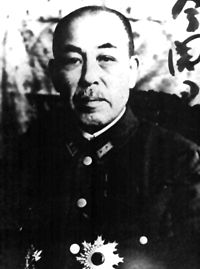
General Rensuke Isogai, Japanese commander-in-chief in Hong Kong
- December 26th 2015 is an
official holiday in Hong Kong, being the first weekday after Christmas Day. On
this day, Hongkongers will gather around to celebrate the formal surrender of
Hong Kong by the British to the Japanese Imperial Army in 1941 at a signature ceremony at the
Peninsula Hotel. It demarcates the beginning of the three years and eight months
of occupation. Sin Chung-kai is completely fine with this, of course.
- During the British colonial era,
the second Monday of June was a public holiday known as the Queen's birthday.
After the handover in 1997, that day was replaced by July 1st, known as the
HKSAR Establishment Day. Both days are clearly as politically significant as
possible in their own times. But Sin Chung-kai cannot get rid of July 1st now,
because that is the traditional day for the Civil Human Rights Front march. More
importantly, that is the day of the year when the political parties can gather
the largest amount of donations. We can't cancel that, can we?
- How about making June 4th a
public holiday in Hong Kong? That should please Sin Chung-kai. But wait a
minute, that would be a political holiday and we can't have that. Never mind. Go
back to whatever you were doing before.
- If mainland China and Macau are
having a national holiday, do you think Hongkongers should go to work as usual?
- Is this going to be a genuine
public holiday or a false one? Do we have to pocket it first? Or do we pocket it
forever? These are the key questions that must be answered first.
- Sin Chung-kai said that holidays
must be proposed six to nine months ahead of time so that the public can make
suitable arrangements. He said: "We need to balance these requirements against
the public wish for holidays. At the same time, we need to consider whether this
sort of thing should be encouraged."
- Fuck! The next time that the Observatory hoists a Number 8 typhoon signal, we
need to have Sin Chung-kai's permission to go home because he doesn't want to
encourage "this sort of thing."
- Sin Chung-kai does not want his Legco aides to take time off, because who is going
to help him fight for genuine universal suffrage? Every extra hour that
they man their stations is another step closer to genuine universal suffrage.
- If Hong Kong is ever going to be
an independent city-state, it is going to need the support of the United States
and Japan. They think that as soon as they declare independence, United States
and Japan will recognize the new nation and support its application of
membership to the United Nation. Therefore, there is no way that the City-State localists/nativists are
going to support an anti-Japan public holiday. If September 3rd is declared a
national public holiday, the valiant localist warriors will come out and kick
the suitcases of the tourists.
-
Demographics of Hong Kong: Historical population data
1841: 7,450
1848: 24,000
1851: 33,000
1853: 39,017
1855: 72,000
1862: 123,511
1863: 124,850
1864: 121,498
1864: 125,504
1866: 114,098
1881: 160,402
1891: 221,441
1901: 283,989
1906: 326,961
1916: 530,000
1925: 725,000
1931: 849,800
1941: 1,600,000 (beginning of Japanese occupation)
1945: 500,000 (end of Japanese occupation)
1945: 600,000
1945: 750,000
1950: 2,200,000
1950: 2,360,000
1960: 3,000,000
1968: 3,927,000
1970: 3,995,400
1980: 5,109,812
1986: 5,495,488
1991: 5,674,114
1996: 6,412,937
2001: 6,864,346
2011: 7,071,576
1,100,000 Hongkongers left
Hong Kong during the Japanese occupation, for reasons such as oppression,
economy, shortages, starvation, etc. Then there was a mass return of many who
are today's Hong Kong senior citizens. Today, the media makes as if these senior
citizens are already dead and the present/future belongs to young people. Here
are the
Hong Kong voter registration statistics:
18-20: 106,320
21-25: 257,295
26-30: 216,508
31-35: 248,118
36-40: 260,032
41-45: 280,690
46-50: 337,354
51-55: 427,616
56-60: 392,364
61-65: 312,604
66-70: 206,032
71 or above: 462,853
TOTAL: 3,507,786
- (YouTube)
Examples of fawning on British royalty during the colonial era
0:13. The Queen of England visited
Hong Kong in October 1986 for three days. The second day was designated as a
public holiday.
0:29. The Prince of Wales Charles
and Princess Diana got married in July 1981. The wedding day was designated as a
public holiday. While most government offices were closed, the Post Office
opened at 630am as people queued up to get commemorative stamps. Even China
Motor Bus dressed up one of its buses for the occasion.
(Apple
Daily) May 16, 2015. Video at
https://www.youtube.com/watch?v=k4qnmJhjot4 .
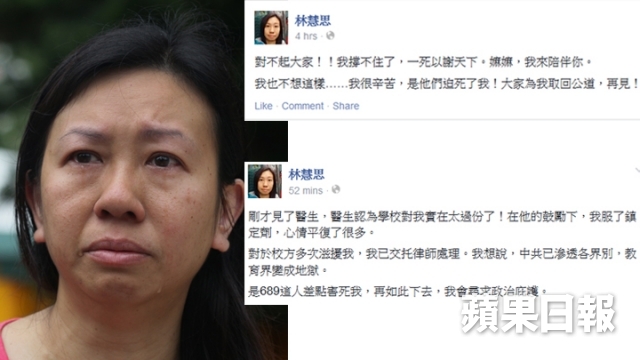
Foul-mouthed teacher Alpais Lam
Wai-Sze
(she even has her own page at the
South China
Morning Post) said that she had resumed teaching after taking a
six-month paid leave in the aftermath of the foul-mouthed incident. But the
school's principal and supervisor summoned her frequently to tell her that her
Facebook comments were mis-educating students. Recently, the school principal
asked her to ban minors from reading the comments, or otherwise turn her
Facebook into a private page. Lam said that this was a violation of her
freedom of speech. She has consulted a lawyer and sent a lawyer's letter to the
school.
This morning, she wrote on her
Facebook: "Sorry everybody!! I can't take this anymore. I want to die. Grandma,
let me come and keep you company. I don't want this to happen ... I find it
hard, they want me to die! Please seek justice for me. Goodbye!"
A few hours later, she wrote: "I
just went to see the doctor. Even the doctor thought that the school went too
far! With his encouragement, I have taken a sedative and I feel calmer now. I
have asked my lawyer to deal with the harassment by the school. I want to say
that the Chinese Communists have infiltrated various sectors, and the education
field has turned into hell. It was 689 who nearly killed me. If this continues,
I will have to seek political asylum."
Video: Alpais Lam says to a
police officer: "Fuck
your mother!" She denies that she said that.
Internet comments:
- This woman is batshit crazy. I
would be deeply concerned if she is teaching my child. For further reference,
see
Alpais Lam's Husband Has Left Her.
- I agree with one part of her
Facebook posts: the education field has turned into hell. That would be courtesy
of nutty teachers like her.
- Never in the history of this
discussion forum have so many commentators want one person DOA ASAP RIP.
- This fucking woman says FUCK to
everything.
Because she is ugly, she says FUCK.
Because her husband left her, she says FUCK.
Because CY Leung won't resign, she says FUCK.
Because Li Ka-shing is not her dad, she says FUCK.
Because her students did not all get A's, she says FUCK.
Because Apple Daily gives her an interview, she says FUCK.
Because Oriental Daily does not give her an interview, she says FUCK.
Because her principal won't give her a huge salary raise, she says FUCK.
Because of no reason at all, she says FUCK.
- Alpais Lam said that she is
under great psychological pressure. The parents whose elementary school children
are taught by her are under even greater psychological pressure. Sooner of
later, she will drive the parents crazy because they have to worry about their
children being brainwashed by this member of the radical DLLM Orchid (= a
homonym of "Fuck your mother's stinking rotten cunt" in Cantonese) group.
- Interesting. Does a teacher have
unrestricted right to post anything she wants on her Facebook, given that she is
an Internet celebrity who teaches at
Pui Ling School of the
Precious Blood in Fanling district?
- The principal and the supervisor
at her school must be under the most psychological pressure. Every day, they
must worry about what new paranoid stories Alpais Lam is posting onto her
Facebook.
- The only way to cope with such a teacher is not to hire her in the first
place. Once hired, she will be a scourge who cannot be fired because of
freedom/democracy/human rights/democracy/universal values/rule of law.
- If the school principal disciplines Alpais Lam, the "Yellow Ribbon"
Professional Teachers Union will step in and sue the school.
- It should be obvious that Alpais
Lam is angling for yet another 6-month paid leave by faking mental illness.
- No, it should be obvious that Alpais Lam has a new book out just in time for
the Hong Kong Book Fair in July. She needs the pre-launch publicity now.
- Reading more Alpais Lam news
stories is driving me crazy! Why can't she just check into the Castle Peak
Psychiatric Hospital like she should? If 689 (=Chief Executive CY Leung) is
spending all
his time persecuting her as she thinks, where does he find the time to do anything else? It is
more plausible for CY Leung to think that Alpais Lam and her fellow "Fuck Your
Mother's Stinking Rotten Cunt" gangsters
are persecuting him.
-
Paranoid
schizophrenia can be easily controlled if you take your medications
according to the schedule. She must have skipped her medication to rave and rant
like this.

"Hey! It's time to take your medication ..."
- I really look forward to reading
the response from the United States State Department upon receiving Alpais Lam's
application for political asylum. They didn't take kindly to the
Marielitos who
included many mental patients.
- The United States State Department will likely reject her application for
immediate asylum, because her mission to make trouble in Hong Kong is not
completely done yet.
- Some reader comments to Alpais
Lam's Facebook post:
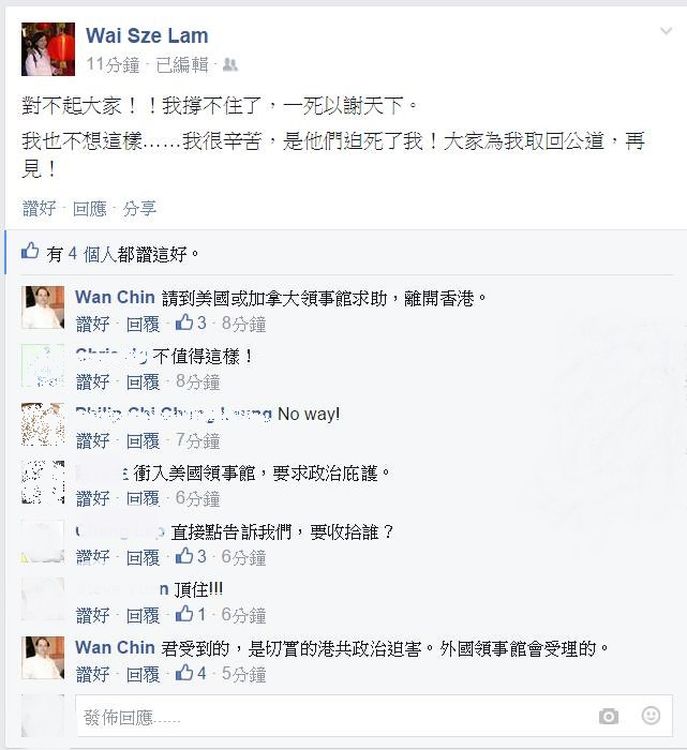
Wan Chin: Please seek help at the American or
Canadian consulates and leave Hong Kong.
???: This is not worth it.
???: No way!
???: Charge into the American consulate and demand political asylum.
???: Tell us directly whom you need taken care of?
???: Stand firm!!!
Wan Chin: What you are experiencing is very real political persecution by the
Hong Kong Communists. The foreign consulates will accept your case.
- (Apple
Daily) Alpais Lam is going to ask the Professional Teachers Union and
retired Catholic archbishop Joseph Zen for help because school administrators
have met with her more than 10 times over matters that she says are unrelated to
teaching (namely, her extracurricular speeches, demonstrations and
Occupy Central). She considers these meetings to be very unreasonable. She knows
that if she gives up or resigns, other teachers like her will be oppressed as
well.
- Freedom of speech? Professional Teachers Union? If they help her, I want to
know why they won't help the Baptist University vice-chancellor (a bona fide
professional teacher) who was
exercising his freedom of speech but told to shut up by the students.
- Interesting that she wants the help of the retired Joseph Zen instead of the
current diocese leader Bishop John Cardinal Tong Hon. Clearly, within any
institution, people have different political positions and belong to different
political factions. If the supreme leader is on the wrong side, you seek out
someone on your side for support.
- (memehk.com)
Two faces of one body: Chris Wat and Alpais Lam. By Steven Siu. May 19, 2015.
https://youtu.be/QfVpL0X2VcY
Many people want me to talk about
Chris Wat but I haven't. She is the wife of Lam Chiu-wing. Actually I rarely
talk about her. Not that I am embarrassed because she is Lam's wife, but because
what she said is not worth discussing. She is an ordinary newspaper columns, and
what she writes about is too ridiculous. For example, her Hong Kong is very good
because the autistic man was released after 72 hours whereas he could have spent
a lifetime in jail in America until exonerated recently by DNA recently. How
does she know if someone was wrongfully jailed for life in Hong Kong? This naive
type of logic is not worth discussion. But I can talk about Ms. Wat and another
person are two sides of the same body, with not much difference between them.
That other person is Alpais Lam.
Chris Wat said that she was no
freedom of speech because she is being attacked. I have said many times before
that freedom of speech means you can say whatever you want, but other people
also have the freedom of speech to criticize you. Otherwise only you have the
freedom of speech, but nobody can criticize you. This is commonly known. When
public authority intervene to prevent you from speaking out, that would be
infringing on your freedom of speech. When you get arrested for saying something
or when the government applies pressure on you, that would be infringing on your
freedom of speech.
The case of Alpais Lam. Did her
school violate her freedom of speech? A little bit. But it is reasonable for the
school to ask that she made her Facebook inaccessible to persons under the age
of 18. It is too unsuitable for minors. But I don't see the school applying a
lot of pressure on Alpais Lam. She tends to say that everything is political
persecution. In truth, she has taken a long time off because of her mental
problems. She can't be dismissed because that would be political persecution. As
soon as she is mentioned, she says "political persecution."
Chris Wat and her ilk have been
brought up that way and are incorrigible. She graduated from Heung To Middle
School, so you can imagine. I don't think that she took money. Some people are
born to trust the establishment, to believe in law and order and are very
stubborn. Therefore she and Alpais are two sides of the same body but with
different kinds of stubbornness. I dislike Alpais Lam because she scolds her
parents. When the League of Social Democrats and People Power split up, her
father Lam Sum-shing went with the League of Social Democrats. Therefore Alpais
Lam was particularly critical. After People Power broke up, she continued to
scold them. Her parents felt helpless. Alpais Lam should take a break. Emotional
illness are genuine illnesses. She is not just thinking too much, but she is
really sick. She can become a teacher only if she is healed. I see that the
students left comments to say that she was not a bad teacher. But is she fit to
be a teacher when her emotional illness is so serious? When she talks about
committing suicide, she is not fit to be a teacher anymore because it is
dangerous. If she refuses to rest and ends up committing suicide, the students
will suffer repercussions. She should take immediate action and not treat this
as nothing. She said that she wanted to seek political asylum at the American
consulate and this should be treated as nothing either. In Hong Kong there are
very few clinical psychologists and psychiatrists. If she seeks help through the
public health system, she may have to wait a long time. Such illnesses are not
covered by insurance. We should improve our services in this area.

The
Justice and Peace Commission
of the Hong Kong Catholic Diocese has issued a joint petition to defend
the dignity of mankind and oppose the fake universal suffrage.
We are a group of Catholic
individuals and Catholic organizations. We believe that God created mankind so
that they can live with dignity and participate in caring about the world and
each other. Therefore we have the responsibility to build a broad-based and
equal democratic system in which each citizens has the right to nominate,
participate and vote. This the basic right that God has given to mankind. Yet
the August 31st 2014 resolution of the National People's Congress Standing
Committee has indefinitely postponed universal suffrage in Hong Kong. The
recently proposed bill from the government is clearly false universal suffrage.
...
We urge the Hong Kong SAR
government not to ignore the demands for universal suffrage by the people of
Hong Kong. We urge:
1. All Legislative Councilors veto the constitutional reform proposal being
offered by the government;
2. The National People's Congress Standing Committee rescind its August 31st
resolution.
Internet comments:
- Coming from the Catholic
Diocese, this raises two obvious questions that they should answer first:
1. Where the fuck were you guys when the British colonizers ruled Hong Kong in a
completely undemocratic fashion?
2. Why the fuck don't you have one-person-one-vote to elect the Pope?
- Bishop John Cardinal Tong
Hon did not get elected by the Hong Kong Catholics. He was parachuted here
by appointment of the central government in Vatican. Hong Kong Catholics
seem perfectly content with this arrangement. But God forbid that the
central government Beijing should parachute a Chief Executive into Hong
Kong!
- Before 1997, the Hong Kong
citizens were sub-human, and therefore have no human rights or dignity.
- The United Kingdom does not have
civil nomination for Prime Minister. Therefore, the British people have no human
rights or dignity. Being the barbarians that they are, they can treat
the colonized people as dogs as long as they have the gunships.
- I want to have
one-person-one-vote to elect the Pope. I don't even need to have civil
nomination of the papal candidates. I am simply offended at the idea that the Cardinal
Conclave have reached a decision by sending out white smoke from the Sistine
Chapel chimney. Why would I trust the decision of some weed-smoking
octogenarians?
- According to
Wikipedia, there were 374,000 Hongkonger Catholics in August 2013. How
many of these Catholics signed this joint petition? If not every one of them,
then did the petitioners consult the rest? Could there be some Catholics who
support the government's proposal? Or were they represented by the petitioners
by executive fiat (Bishop John Cardinal Tong Hon or Pope Francis)?
- The Justice and Peace Commission of the Hong Kong Catholic Diocese should not
only make it clear that they represent some (but not necessarily) all Catholics.
Further, they need to spell out their numbers (e.g. 1,035 signatures were
collected).
- According to
Wikipedia, there are 147,000 Filipino Catholics in Hong Kong. These
people are ineligible to vote in the foreseeable future, even though many of
them have lived here for a long time. Will the Catholic Church stand up for
their dignity and human rights? And if the Catholic Church won't even help their
faithful, how much faith can you have in it?

(Wen
Wei Po) Job Search May 13, 2015.
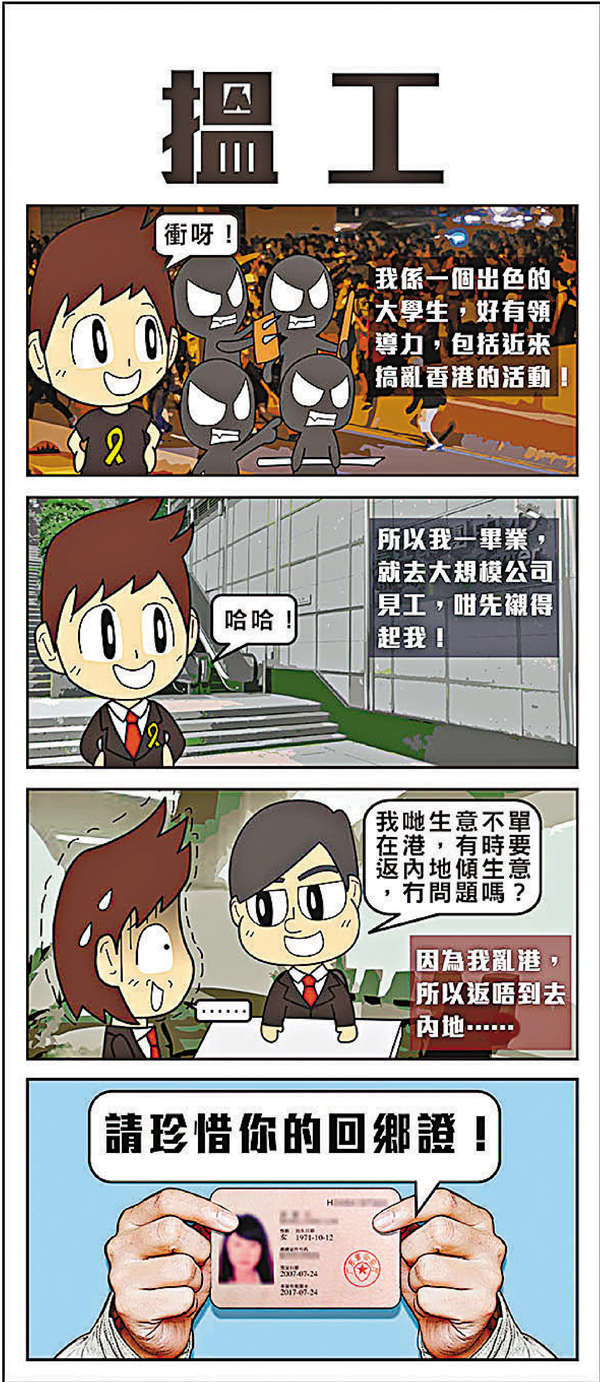
Frame 1: Charge! I am an
outstanding university student. I have good leadership skills, including causing
trouble recently in Hong Kong.
Frame 2: Ha ha! As soon as I graduate, I want to get a job with a large company
as befits my ability!
Frame 3: Manager: "Our business is not just in Hong Kong alone. Sometimes you
have to go to the mainland and discuss business. Is that alright?" Because I
was a troublemaker in Hong Kong, I can't go the mainland anymore ...
Frame 4: Please value your Home Return Permit!
Recently an Internet user posed on
a discussion forum: "A certain transnational Hong Kong financial company is
hiring new workers, and they have set the in-person interview in Shenzhen. The
purpose was to check if the applicant has a valid Home Return Permit to enter
the mainland. During the Occupy Central period, some young people have had their
Home Return Permits canceled because they participated in the illegal Occupy
actions. Many companies are unwilling to hire Occupy participants."
Internet comments:
- Occupy people don't need to get
a job. They find it easier to go on the dole while other suckers work hard and
pay taxes to support them.
- Occupy people don't have Home Return Permits because they don't want them.
They know that they risk being brainwashed if they go to the mainland. So they
don't.
- Not true. While some of the Occupy arrestees are unemployed, many others are
lifeguards, delivery workers, janitors, waiters, dishwashers, cooks, sales
assistants, aides to politicians, etc. Those others do not need Home Return
Permits. At worst, they won't be able to sweep the graves of their ancestors.
- Occupy people are lower-level workers. Those who need to travel to mainland
China to discuss business are senior staff members.
- Occupy people have a favorite
saying: They are so poor that all they have left is money. Lots of it. They will
never need to work for a living.
- There was just a news story about a 26-year-old university graduate now
working as a dim sum assistant chef.
- Even when the company is
completely based in Hong Kong, they are still reluctant to hire recent
university graduates from Hong Kong. After all, other companies may send a
mainlander representative over. If you have a bad attitude towards mainlanders,
who knows if you start beating them up like you valiantly beat up the Tuen Mun
Park grandpa? That would be disastrous.
- I would never hire an Occupy
person. Next thing you know, they are going to demand the company CEO be elected
on one-person-one-vote basis. If you don't agree, they will occupy your office.
Ridiculous? Already the students are demanding universal suffrage for the
university president/vice-chancellor even if the students are unqualified to
evaluate academic credentials.
- The company pays me a monthly salary, so I won't demand one-person-one-vote
for company CEO. If the government pays me the same monthly salary for doing
nothing, I won't demand one-person-one-vote for Chief Executive either. Right
now I am paying taxes to the government. Therefore I demand one-person-one-vote
to make sure that my taxes pay for the right person's salary.
- Occupy people won't lack job
offers. The Falun Gong is always hiring.
- Occupy people can also work for Apple Daily. Their reporters aren't allowed
into mainland China. Therefore the job won't require a Home Return Permit.
- Which transnational finance
companies are doing this? Give us some names, so that we will refuse to bank
there. That should scare them back to their senses.
- Which transnational finance companies do not have business in China? Why would
they have a Hong Kong branch office if they don't have mainland business
dealings? They all do.
- Value your Home Return Permit
... unless you already have an American green card. In which case, you can get
your American company to get you an American passport to enter mainland China.
- Eh ... even Americans can get blacklisted by the Chinese national security
bureau. Do you think Wang Dan or Wu'er Kaixi can go back to China?
- The Home Return Permit is
seductive and therefore dangerous. The best solution is to find a pair of
scissors and cut it up.
- Easy for you to say. If you work for Ng Fung Hong, you will have to travel to
mainland because your main business is meat products (poultry, pork, beef, etc).
If you drive a delivery truck, you will have to travel to mainland regularly,
perhaps even several times a day. Easy for you to say only because your current
job does not require you to travel to the mainland. Other people aren't in your
situation.
- (Headline
News) By Chris Wat Wing-yin. June 11, 2015.
What do you get after seeing your
child go all the way through university? Nowadays you can't say it openly.
Once upon a time, "my child is a
university graduate" is an honor. Today, the same statement elicits non-stop
follow-up: "Oh, your son/daughter is a university graduate? Oh."
Then they pursue impolitely:
"Which university?"
"Lingnan University." "Oh, the one
with the foul language."
"Baptist University." "Oh, the one
which cursed out their chancellor."
"Chinese University of Hong Kong."
"Oh, the one who won't let the People's Liberation Army visit."
"..."
You spend more 16 years to see
your child through university and you should be reaping your rewards. But it has
turned out to be a total waste of time. They talk the same way, they act the
same way, they think the same way, they walk the same pace, they share the same
hatred as their leaders hypnotize them: You are the future of Hong Kong, you are
the hope of the future! But we are deeply aware that we will lose an entire
generation as a result of this Great Cultural Revolution of Hong Kong.
This is the time of year during
which graduates begin job interviews. A rumor earlier was that many
multinational companies have set up job interviews in Shenzhen to test whether
the applicant has a Home Return Permit to enter mainland China.
I don't know if that's true. But
many organizations have stated that they won't hire graduates from universities
in Hong Kong. For over half a year, the world has observed the quality of our
university students. So they are going to reject all of them, whether they were
resisters or not. The employers would rather hire graduates from foreign
universities, even mainland ones. There is now a wave to reject local university
graduates.
...
One student complained: "I am
innocent. I am not a Yellow Ribbon. I don't even have any political positions.
What should I be dragged in?"
When you refuse to speak out, when
you just follow the team, when you don't know how to raise questions, when you
don't mind to be represented, you are destined to become cannon fodder along
with them.

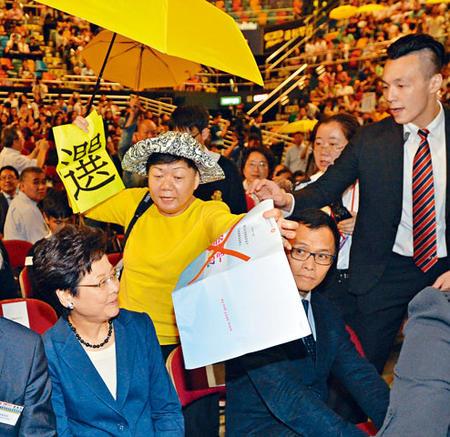
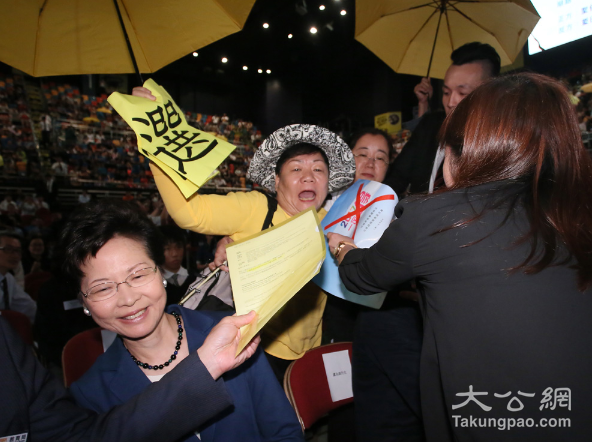
The "Goddess of Democracy" Mandy Tam Heung-man
attempts to deliver a message to Chief Secretary Carrie Lam Yuet-ngor
(Headline
Daily) May 16, 2015.
Yesterday Sing Pao News Group
sponsored the grand final of the Hong Kong scholastic debate competition.
Legislative Councilor "Long Hair" Leung Kwok-hung and members of the racial
organization People Power charged into the hall and harassed the guests. They
pushed and shoved while chanting slogans in order to disrupt the proceedings.
This debate competition has
traditionally been an important event among secondary schools. These
demonstrators showed no respect for the students, teachers and parents who were
participating in this event. Our group deplores their actions.
(Sing
Tao) May 16, 2015.
During the student debates, the
government's Information Services Department director Joseph Nip Tak-kuen went
up to deliver a speech. Nip began by saying: "Let those students present be ..."
and then his voice was covered up by the shouting. Several seconds later he
politely tried to persuade the demonstrators: "I believe that those friends who
want to express their opinions have already expressed those opinions. I don't
think that it is mutual respect to prevent other people from speaking ..." But
the demonstrators continued to shout. Some demonstrators even tried to charge on
stage, but they were stopped by security guards.
(Ta
Kung Pao) May 16, 2015.
Paul Shieh Wing-tai, former
chairman of the Senior Barristers Association, was also interrupted during his
speech. Shieh said that this night was the most important night in the lives of
some students, but the event has been hijacked by the demonstrators. He called
for the debate team members and other students to clap their hands in order to
take back their event. The students clapped their hands in response. However the
troublemakers were oblivious to the wishes of the students and continued to
shout. One female demonstrator tried to charge on stage with a yellow umbrella in
hand. When the security guards blocked her, she took her shoes and socks off and
deliberately fell down on the floor. There was chaos all around.
People Power's Tam Tak-chi said
that they were forced to do this because "there is no other way of expressing
their wishes." He said that the demonstrators did not interrupt any speech
except when Carrie Lam presented the trophies. A student said: "They are free to
express their demands, but they shouldn't interrupt other people's speeches."
(EJinsight)
June 5, 2015.
Sing
Tao News Corp. (01105.HK) is seeking compensation of at least HK$1.57
million (US$200,000) from three protesters who disrupted a schools debate
last month, Ming Pao Daily reported Friday.
It has sued lawmaker “Long Hair” Leung
Kwok-hung, who is the chairman of the League of Social Democrats, and People
Power members Mandy Tam Heung-man and Tam Tak-chi.
The lawsuit says the trio caused a
nuisance, disturbance and disruption of the finals of the 30th Hong Kong
Inter-School Debate Competition sponsored by the newspaper firm on May 15 at
Queen Elizabeth Stadium.
Chief Secretary Carrie Lam Cheng Yuet-ngor
was guest of honor at the event and was scheduled to deliver a speech.
However, while the event was in progress, the suit says, Leung suddenly
shouted slogans through a loudspeaker, Mandy Tam unfurled a yellow umbrella
and handed a petition to Lam, while Tam Tak-chi shouted and threw paper
balls at the organizers. Lam was forced to leave without delivering her
speech, disappointing the debate participants, the suit says. It says the
shouting by the defendants prevented the scores given by the judges from
being heard.
Sing Tao News Corp., publisher of Sing Tao
Daily and The Standard, is claiming a manpower cost of more than HK$1.5
million for the preparation, promotion and production of the event and an
out-of-pocket expense of HK$75,000. It asked the court to prohibit the three
defendants from taking part in any events organized by Sing Tao Daily.
(SCMP)
October 5, 2016.
A magistrate has
rejected calls to step down from a trial of “Long Hair” Leung Kwok-hung,
despite claims by the defence he might show bias due to the lawmaker’s open
criticism of him in the past.
Eastern Court’s
acting principal magistrate Joseph To Ho-shing said it was not a normal
practice for a judge to recuse from a case, save for exceptional
circumstances, or it would create the wrong message that people can handpick
their judges. “What if someone made high-profile criticism against all judges,
one by one naming them. Would that mean no judge in Hong Kong can try him?” To
asked.
Leung and his
co-defendant Tam Tak-chi from People Power were previously brought before
magistrate David Chum Yau-fong for pretrial reviews on a charge of obstruction
following the storming of Sing Tao News Corporation’s school debating
competition in May last year
The lawmaker had
told then-principal magistrate Bina Chainrai in February that he had no
objection for his case to be dealt by magistrates who handled his cases
before, with the condition: “Save for Joseph To.”
Leung’s
lawyer Douglas Kwok King-hin said on Wednesday it was their understanding that
Chainrai made the arrangement for his client to be tried by other judges, such
as Chum, as there might be embarrassment when Leung had openly criticised To
many times.
But To countered
that Chainrai was not told what Leung had said before, and said he was certain
that he had never handled the lawmaker’s trials.
The exchange
between the pair took place in quick succession like a ping pong match as To
repeatedly fired questions at the lawyer, with Kwok at one point stating:
“You’ve interrupted me too many times, I cannot elaborate.”
Leung, seated
behind his lawyer, was also pulled into the game as To twice remarked that he
was distracted by the lawmaker’s small gestures like smiling and nodding. “A
trial is a highly focused and concentrated process,” the magistrate said.
“Don’t make unnecessary gestures, I have to ensure that I can completely hear
the submissions.”
Leung and Tam are
facing a five-day trial for allegedly obstructing, disturbing, interrupting or
annoying other people who were lawfully using the Queen Elizabeth Stadium
during the 30th Sing Tao Inter-School Debating Competition on May 15 last
year.
The event was
attended by 2,424 students, parents, teachers and guests such as Chief
Secretary Carrie Lam Cheng Yuet-ngor, former Bar Association chairman Paul
Shieh Wing-tai and then-director of information services Patrick Nip Tak-kuen.
Organiser Cheng
Yin-ling from Sing Tao testified there were up to 90 protesters chanting
slogans and waving banners when she escorted Lam into the venue. “I recognised
the famous protesters, including Leung Kwok-hung and Tam Tak-chi,” she said.
“I especially noticed that after they used megaphones and microphones to
shout, they incited more people to join them.” She recalled the protesters
shouted “Lam sick Yuet-ngor” and threw paper balls that she caught before they
struck Lam.
The disturbance,
she said, made organisers change their programme, cancel Lam’s speech and
remove a photoshoot as protesters repeatedly ignored requests and “warm
reminders” for them to quieten down and respect the event. They also incurred
extra costs in hiring security to ensure Lam’s safety. “[Shieh and Nip] gave
speeches but most of the content could not be heard,” Cheng said. “It was an
unfortunate waste of manpower and resources.”
(The
Standard) October 7, 2016.
Security measures had been stepped up in the
31st Sing Tao Inter-school Debating Competition held earlier this year after
protesters stormed the competition in May last year, the organizer told the
court yesterday. It was the first time in the history of the three-decade old
event for the enhanced security measures, Sing Tao marketing director Cheng
Yin-ling told Eastern Magistrates' Court.
Cheng was testifying against League of Social
Democrats lawmaker "Long Hair" Leung Kwok-hung and People Power member "Fast
Beat" Tam Tak- chi, who have pleaded not guilty to breaching the Civic Centre
Regulation. Cheung said her company had never imagined that the debating
competition would be linked to the political environment.
After the protest last year, Cheng said the
company recruited an extra six to eight security guards to protect the special
guests and also built higher fences between the public and guest area.
Everyone had to undergo a security check
before being admitted to the venue, particularly those who had bulky items so
as to prevent people like the defendants who took loud speakers and banners
into Queen Elizabeth Stadium.
Former Bar Association chairman Paul Shieh
Wing-tai told the court that the protesters who stormed the competition
"crossed the line" and "hijacked" the occasion.
Shieh was an adjudicator at the 30th Sing Tao
Inter-school Debating Competition held on May 15 last year.
Before acting principal magistrate Joseph To
Ho-shing, Shieh said he could hear people chanting "I want genuine universal
suffrage" and the noise was so loud he estimated there were more than 10
people protesting. The venue was chaotic and noisy and Shieh said he "missed
it" when the host invited him on stage for comments, adding that his attention
was focused on the noise.
He told the court that some people threw
yellow paper from the spectator stand when he was on stage. Before he went on
stage, he invited the audience to clap, to drown out the noise from the
protesters who "hijacked" the event. Douglas Kwok King-hin, for Leung, asked
Shieh for his motive when he invited the audience to clap. He disagreed with
the defense claim that he was trying to stop the audience from listening to
the lawmaker's demand. The hearing continues.
Video: (dbc)
https://www.youtube.com/watch?v=hkVuE5QzVzs to see how the event was made
impossible by the shouting from the demonstrators.
(SCMP)
November 21, 2016.
Radical lawmaker “Long Hair” Leung
Kwok-hung was jailed for seven days on Monday for disturbing participants at a
school debating event last year when he and others staged a protest directed at
Chief Secretary Carrie Lam Cheng Yuet-ngor.
He was
immediately freed on HK$4,000 cash bail, pending an appeal that will also be
lodged by his co-defendant, People Power activist Tam Tak-chi, who was
sentenced to seven days’ imprisonment, suspended for 12 months.
Leung said
outside Eastern Court the ruling was like a knife placed above all
protesters as they were not warned by anyone at the time that they might be
breaking the law, nor told to leave the venue.
“The right to demonstrate in front
of political celebrities will exist no more,” he said.
Tam, who
previously had a clear record, added their case was a warning to all not to
cause any trouble. “We were just chanting slogans and waving placards, no
one expected a protest of this nature would warrant a jail sentence,” he
said.
The pair had
argued that the charge against them breached their right to express
themselves freely during a peaceful assembly in a public place.
But that was
rejected in Eastern Court, which found Leung, 60, and Tam, 44, had
intentionally “obstructed, disturbed, interrupted or annoyed” other people
who were using the Queen Elizabeth Stadium during the 30th Sing Tao
Inter-School Debating Competition on May 15 last year.
Acting principal
magistrate Joseph To Ho-shing noted the protest was staged at a civic
centre, a unique environment protected by specific laws – unlike street
protests where people could just leave if they did not want to be disturbed.
“This case
involved an event that was planned for more than a year,” To said. “The
defendants’ behaviour violated the lawful exercise of the constitutional
rights and freedom of more than 2,000 people.”
Leung and Tam,
he said, could have staged their protest on another occasion while the
parents and students attending the event had only one opportunity to enjoy
their rights on the 30th anniversary of the competition, and they had
clearly showed their disagreement at the protest.
Leung took a
deep breath as To delivered the verdict while Tam did not react.
Under the Civic
Centres Regulation, the offence is punishable by a HK$5,000 fine and
one-month imprisonment.
Neither
defendant took the stand nor called any witnesses in their favour.
The court heard
that organisers had begun preparations for the event the summer before. It
was attended by 2,424 students, parents, teachers and guests including Lam,
former Bar Association chairman Paul Shieh Wing-tai and then-director of
information services Patrick Nip Tak-kuen.
Dozens of
protesters began shouting, chanting slogans, waving banners and throwing
paper balls when Lam was escorted into the venue, and they repeatedly
disrupted speeches by Shieh and Nip.
Lam’s speech was
eventually cancelled and she left the venue early. The commotion lasted for
30 minutes.
Sing Tao
reported it to police a few days later and filed a civil suit in June last
year, demanding more than HK$1.5 million from the duo and district
councillor Mandy Tam Heung-man, also from People Power. The company is
seeking an injunction to bar the three from its future events.
Internet comments:
- Why should the students, parents
and teachers be upset? Don't they know the Rules of Demonstration in Hong Kong?
As soon as the media took enough videos and leave, the demonstrators will
vanish. All the demonstrators want is 10 seconds on the television evening
news. Without the media present, they have no motivation to work. This would be
like the classic Zen koan “If a tree falls in the forest, and there is no one
there to hear it, does it make a sound?”
- If they can open up yellow
umbrellas at their own university graduation ceremonies, they can surely disrupt
a measly student debate competition. This grand final may be the most important
event in the lives of those students, but that is nothing compared to the grand
enterprise of democracy-building for 7 million persons in Hong Kong. By
disrupting the event, democracy will be evermore closer. This was absolutely worth it.
- It turns out that Civic Party
legislative councilor Alan Leong was one of the judges in the competition. He
had reservations about the disruption: "I don't think that raising the umbrellas
is a big deal. But when it became impossible for the judges to explain their views
or for the students to listen to those views, then this is out of hand." Leong
said that the students should be allowed to enjoy the fruits of their efforts.
- What is this about being able to enjoy the fruits of one's efforts? What about
the small businesses that were affected by the Occupy Movement? Why weren't they
allowed to enjoy the fruits of their efforts?
- People Power's Tam Tak-chi has a
famous saying: "I see no need to apologize to the students."
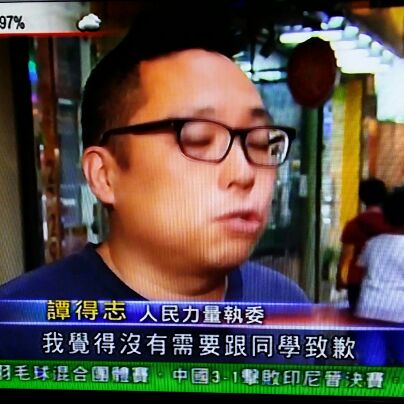
- Government officials should take
part in more of these types of events. The parents and teachers will think twice
when they cast their ballots in the upcoming District Council and Legislative
Council elections. The pan-democrats are going to bleed slowly to death with
more incidents like this one.
- This debate competition is
highly undemocratic anyway.
First of all, the student debaters were not elected by one-person-one-vote with
civil nomination. Instead, they were selected by the teachers as being the best
debaters in the school.
Secondly, the judges were not elected by one-person-one-vote with civil
nomination. Instead, they were celebrities (such as legislator Alan Leong (Civic
Party)) invited by the organizers based upon unknown criteria.
Therefore, this was a false debate competition. We are better off without it.
We want a genuine debate competition, one with one-person-one-vote and civil
nomination. If you won't let us have that, we'll block all traffic in Admiralty,
Causeway Bay and Mong Kok until you yield. We also cannot exclude the
possibility that some government property will be damaged, because we are unable
to control the behaviors of all persons.
- The Sing Tao Group belongs to
tycoon
Charles Ho, who is pro-establishment. Therefore any event hosted by the Sing Tao
Group must be stopped in the name of freedom/democracy/universal values/human
rights/rule of law.
- This Yellow Ribbon woman is
well-skilled in the basics of demonstration in Hong Kong. Security guards are
normally male. If any male security guard touches her, she is going to scream
"Sexual assault!" So she will be allowed to lie on the floor as long as they
can't find female police officers to remove her.
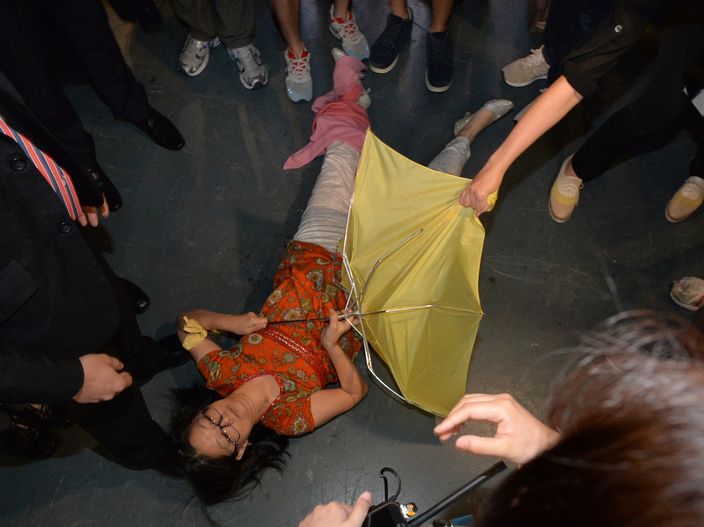
- (HKGpao)
Robert Chow appeared on a radio talk show with Mandy Tam Heung-man and
challenged her: You say that you went there to watch the debate competition as
well as express your views, but can you tell me who won the debate?
At which point, Mandy Tam began a
song-and-dance routine to avoid answering the question, because she clearly had
no idea who won.
- (Sing
Tao) On radio today, Mandy Tam was asked if she would apologize to the
students and their parents. She declined to respond, but she admitted that the
actions that day have room for improvement in terms of fairness and control. But
she pointed out that none of it would occur if only Carrie Lam accepted the
petition letter immediately. In other words, it was all Carrie Lam's fault.
Meanwhile Robert Chow said that
there was no need to have the students and parents sacrifice themselves for this
petition effort.
- (NOW
news) The Sing Tao Group is demanding the demonstrators to pay for
damages. The Group seek $1.5 million to cover the organization, promotion and
operation of the event. Demonstrator Mandy Tam said that they did not disrupt
the students' competition, the figures were unclear and the demand was
unreasonable.
- (Wen
Wei Po) October 7, 2016. At the trial of Leung Kwok-hung and Tam Tak-chi,
the prosecutor Jonathan Man Tak-ho complained to the principal magistrate Joseph
To Ho-shing that the two defendants were saying offensive things behind his
back. The magistrate immediately ordered the court clerk to retrieve the audio
recording from the microphone in front of Leung Kwok-hung. It was confirmed that
the two had said: "Wear school uniform to watch AV (adult video)" etc. The
magistrate ordered Leung and Tam exchange seats with their lawyers.
- Sing Tao marketing director
Cheng Yin-ling testified that she personally heard Tam Tak-chi tell a television
reporter: "I plan to throw a crossed-out document towards Chief Secretary Carrie
Cheng. If necessary, I will charge up the stage." Cheng said that she got very
afraid when she heard that, because she feared for the personal safety of the
students. There were two masters of ceremony, one a university student and the
other a secondary school student. When they heard about this, they were very
worried and afraid. Cheng said that six or seven paper balls sailed past her
head, with two of them falling on the first row of the VIP seats. She and her
colleagues asked the demonstrators to turn off their megaphones. But Leung
Kwok-hung and Tam Tak-chi ignored them. So she told those present that "this is
very tough on the students." Leung Kwok-hung said: "Fine." But three minutes
later, he used the megaphone.
Sing Tao Group senior marketing
director Chan Cheuk-ya said that she heard an audience member tell Tam Tak-chi:
"Please don't do this sort of thing!" Tam replied: "If she won't respond to us,
we'll keep asking her." She saw students trying to listen to the judges speak,
but the noise was too loud. Students made signs to tell the demonstrators to
"shut up."

(Oriental
Daily) May 17, 2015.
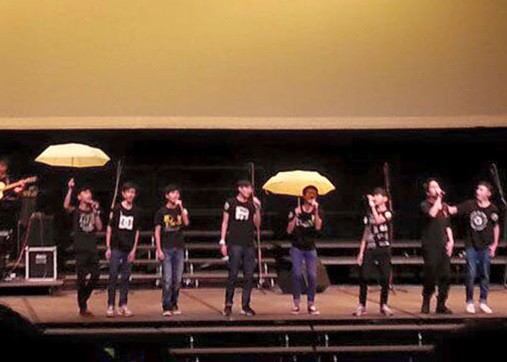
The Hong Kong Civil Education
Foundation organized the event: "Go Hong Kong Dream Music Concert 2015 - The
Awakening" held last night at Queen Elizabeth Stadium in Wanchai. Our newspaper
received at least two complaints from parents. Ms. Lau said that she wanted to
watch her son's choir sing. However, their programme lasted less than 20
minutes. Meanwhile other parts of the programme had singers raising yellow
umbrellas singing "Let us raise umbrellas together" and chanting "I want genuine
universal suffrage." There were also heavily political drama. She was
disappointed that children were being used as political pawns. She felt deceived
into donating indirectly for the foundation to organize this event.
This foundation has 15
consultants, including Democratic Party founder Martin Lee and Professional
Teachers Union president Fung Wai-wah. Fung told our newspaper that he had no
idea what was on last night's programme. He said that this event was similar to
past activities, with the purpose of providing different programs that will
awaken young people into becoming more concerned abut society.
Internet comments:
- This was a Yellow Ribbon event,
so they talk about freedom of expression etc. If this was a Blue Ribbon event,
they would have been screaming "Brainwashing!" or something like that.
- Another part of the programme
could be foul-mouth teacher Alpais Lam teaching children how to tell their
parents to go fuck themselves upon parental demands to do homework or eat
vegetables.
- They fail to gauge how the sight
of yellow umbrellas can upset a significant proportion of the Hong Kong
population. After all, at the end of the Occupy Movement, 80% of the citizens
wanted those Occupy people to go away.
- The pan-democrats think the more
propaganda the better. In the present state of affairs, the more propaganda the
greater the resentment. When people get annoyed with politics (of all forms),
they won't come out to vote. And a low voter turnout works against the
pan-democrats. Sometimes less is better.
- This music concert was a rousing
success ... in arousing widespread resentment. Now that Oriental Daily is
reporting this as news, and the discussion forums are opening multiple threads,
this is a major PR coup for the other side.
- Did this variety show include
the foul-mouth band who sang Fuck the Police at
Lingnan University?
- If they put a bunch of people
carrying yellow umbrellas on the concert poster, people would know what to
expect. This was the actual poster:
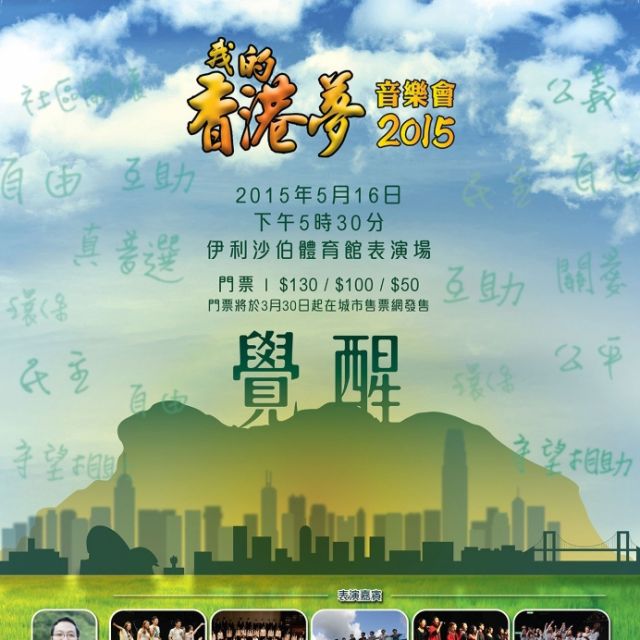
In the background, the words "genuine universal suffrage" appear. Therefore, the
organizers have declared that this was a Yellow Ribbon event. That parent was
sloppy not to notice. She has nobody to blame but herself.
- The Professional Teacher Union
always has plenty to say, but they have gone missing recently. They did not
comment on the disruption of the student debate competition either.

(Oriental
Daily) May 17, 2015.

Last evening at around 8pm, a
46-year-old woman named Chan was walking down Jardine Street in Causeway Bay
when suddenly another woman poured a cup of feces on her. The attacker then
fled, leaving behind the cup and a plastic bag.
According to eyewitness Mr. Chan,
he heard someone shout "Oh!" Then he saw an individual in purple clothes cursed
and walked away quickly. Then he spotted the victim who had feces on her hair
and face. The victim told a female companion: "She is crazy!"
Mr. Chan went up to provide
assistance. The victim went back to her shop to clean up. The police came, took
down the information for a case of common assault.
According to information, the
victim workers at the used handbag store ICON Lady. People Power chairwoman
Erica Yuen said that the shop was owned by her friend and she also puts her own
skincare products there for sale by consignment. Yuen said that she was appalled
by this incident. "Anyone who does that must be punished."
Internet comments:
- Brand new tactic for the
Shopping Revolutionaries?
- Do I know whether the
perpetrator was Yellow or Blue Ribbon? I don't know, but that won't stop me from
commenting as if I know. After all, this is the Internet and I don't have to be
responsible about what I say. It is called freedom of expression, freedom of
speech, freedom of press. Get it?
- If this is directed against
Erica Yuen, they could have dumped feces on her. Why dump it on the employee of
the friend of Erica Yuen?
- I wonder what kind of shit this
was (human? bovine? porcine? ovine? elephantine? caprine? canine? feline?). Why? Because I want genuine shit, not fake shit.

(SCMP)
City University is latest to leave Hong Kong Federation of Students. May 8,
2015.
City University's student union has become
the fourth union to vote to leave the Federation of Students, which played a
leading role in last year's Occupy protests but which is now seeing its
prominence wane.
The decision by CityU students, sealed in a
ballot on Wednesday night, is the latest departure to hit the federation,
the city's oldest and most politically influential student group, which has
historically represented students at eight universities.
The poll outcome was a great setback, as
the federation now could not rightly assert it "stood for the majority of
students", its deputy secretary general, Alan Wong Ka-fai, said. "It is a
reality that we must accept," he told RTHK yesterday.
The series of exits started with the
University of Hong Kong's student union, which voted to leave the federation
in February. Since then, Polytechnic and Baptist universities followed suit
within a day of each other late last month. Their disaffiliations came in
the aftermath of the 79-day Occupy protests, during which university
students complained the federation acted too hastily and failed to consult
them.
The CityU poll drew a turnout of 3,236,
with 2,464 voting to break away, 527 voting to stay and 174 abstaining. A
bag of ink found in one of the ballot boxes contaminated seven votes, which
were later ruled invalid.
Chinese University, the University of
Science and Technology and Shue Yan University are the remaining members
along with Lingnan University, which voted in an earlier referendum to stay
in the federation.
Wong said the federation would have to
devote less time to social activism in the coming year and focus more on
internal reform, as those who left cited the group's lack of transparency as
one of their grievances.
But CityU student Tang Sheung-fung, who
initiated the breakaway on campus, argued that student activists could be
more effective outside the federation structure. "Now that the students need
not belong to - and be hijacked by - any big student organisation I am sure
they will be more devoted in the struggle" for democracy, he said.
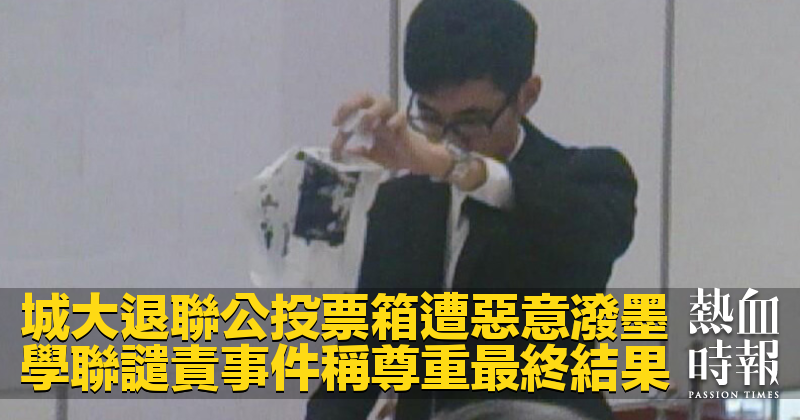
(YouTube
from the City University Broadcasting Channel)
The City University Student Union
held a referendum on whether the union should withdraw from the Hong Kong
Federation of Students. The results are:
Overall voting rate = 19.31%
Total number of votes = 3,290
Number of votes for = 2,464
Number of votes against = 527
Abstentions = 174
Null votes = 72
Upon opening the second ballot
box, it was discovered that some ballots were covered with ink. The committee
determined that the vote would be counted if the voter's choice was not covered
up with ink. The ink was deliberately put inside the ballot box by an
unknown person. Seven ballots were nullified because the voters' choices were
completely covered with ink.
(Video:
https://www.youtube.com/watch?v=1fhg_fHAG2Y INT News Channel)
(Hong Kong Federation of Students)
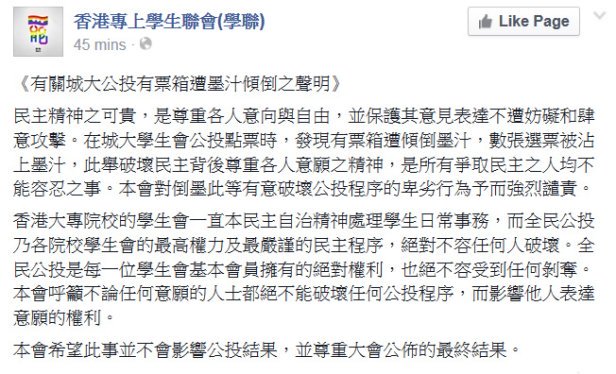
The democratic spirit is precious
because it respects the will and freedom of all individuals, including
protecting the rights of all persons to express their views without
interference. During the City University referendum vote tallying, it was
discovered that ink was placed into some ballot boxes and several ballots were
covered with ink. This action destroys the spirit of respecting everybody's will
in democracy. This is intolerable to all who want to fight for democracy. Our
Federation strongly condemns those who are intentionally sabotaging the
referendum process ...
(Wong
On-yin's blog) May 12, 2015.
The Hong Kong Federation of
Students is a 50-year-old shop. Last year, they initiated a student strike. On
the day when the strike end, they charged into Government Headquarters and began
an unprecedented Occupy Movement. This is the biggest resistance movement in
Hong Kong history. As the leading organization, they should be receiving praises
from the students. Au contraire, four of the eight universities have
elected to withdraw from this old shop through referenda. They are not just
punishing the Federation of Students, but they are also casting a no-confidence
vote on the pan-democrats.
Even more scary is the prospect
that the remaining four universities may also withdraw. As it stands, those four
only represent 35% of all students and therefore no longer representative of all
students. In these times, the Federation of Students and their alumni tried
their best to stem the tide. The pan-democrats also cranked up their propaganda
machine and various commentators offered their wisdom on the importance of the
Federation of Students. But the tide was unstoppable and four universities fell
like dominoes. The Federation of Students was like a political party which lost
its powers overnight. Here, I predict subjectively speaking that the
pan-democrats will meet the same fate in next year's Legislative Council
elections and recede from the stage of history.
Behind the Federation of Students
stands the shadow of the pan-democrats. When the students vote no to the
Federation, they are also saying no to the pan-democrats. It is often said that
the university is a mirror of society, and student politics is a mirror of
social politics. When the students say no to the pan-democrats, it means that
the people of Hong Kong will also say no. Communist monopoly in Hong Kong is
inevitable, and the pan-democratic dream of political monopoly is illusionary
because all that will be removed by the voters in one fell swoop. Once this is
understood, all democracy-lovers must get prepared to find a way to replace the
30-year-old shop known as the pan-democrats.
The Federation of Students used
pan-democratic methods to stem the referenda. The pan-democrats cooperate by
spreading rumors in the usual immoral but effective manner. They claimed that
the China Liaison Office is behind the scenes, that withdrawal would suit the
China Liaison Office fine, that the Chinese Communists would be delighted if the
referenda are successful, etc.
I have not done any research, but
I am very familiar with these tactics which are never based up on evidence.
Students in the same university should be able to have their judgment. The
results are now clear. The funniest response is: What do I care if the Chinese
Communists are delighted? If I don't like it, I have the right to vote under the
democratic system. Students have their own ideas about the student leaders in
the Umbrella Revolution. They will not adore their leaders just because of media
hype. Many students manned the frontlines themselves. For example, in the
November 30th escalation to lay siege to Government Headquarters, the students
and other participants joined with no planning such that failure became
inevitable.
Two things were glaring:
Firstly, the student movement
celebrities were all eating instant noodles in Leung Kwok-hung's office inside
the Legislative Council building and not joining the masses to face the dangers.
Secondly, I was there and I
observed that the demonstrators will completely unarmed. They occupied Lung Wo
Road only because the police withdrew. At 2am, the police retook Lung Wo Road
with one round of baton charge. Between 230am and 730am, the police withdrew
back to Government Headquarters. The remaining crowd stood around Government
Headquarters unable to attack. Knowing that they have no chance of successfully
besieging Government Headquarters, the student leaders waited five hours without
calling a halt. In the end, there was another more serious round of bloodshed.
Why? In one interview, Alex Chow
indirectly admitted that he wanted the radical elements to see the hopelessness.
In the end, the student leaders and the pan-democrats worked with the government
to put an end to the occupation of Admiralty. No government official resigned
and nothing was gained on the constitutional reform. Those students were not
passive readers in a library. They participated in the events and paid with
blood and sweat. They did not just watch television. Today, they are being
generous by only seeking accountability from the student leaders who betrayed
them.
If this is how the students think
of the Federation of Students, then the citizens are angry that that the
pan-democrats have been indecisive, ineffective and pretentious during the
entire Umbrella Revolution. That level of discontent is very real on the
Internet but not in the mainstream media which is controlled by the
pan-democratic forces which will only promote the trivial protest actions of
pan-democratic politicians.
The Chinese Communists are feeling good
about themselves. They have no intention of making any concessions on
constitutional reform. The pan-democrats spread rumors about how the Chinese
Communists will do something or the other to pass the bill. But this is just a
propaganda war between the Chinese Communists and the pan-democrats. The
pan-democrats don't actually have any plans for resistance. They don't even dare
to push the July 1st demonstration march before the Legco vote. The greatest
accomplishment of the pan-democrats will be the vetoing of the constitutional
reform bill. The attitude of the Chinese Communists is very clear on this: they
don't give a damn!
Regardless of the packaging,
citizens can clearly see how democracy has progressed under the leadership of
the pan-democrats this year. The Localists are quickly rising and the younger
generation are looking for "change." With the direct democratic system, the
students have immediately punished the Hong Kong Federation of Students. The
Hong Kong voters will have to wait for the 2016 District Council elections and
the 2017 Legislative Council elections to have their say. It is inevitable that
the citizens will punish the pan-democrats. The only question is by how much.
The pan-democratic politicians
think that as long as they maintain their image and make no major mistakes under
the representation system, they will be able to eke out several tens of
thousands of votes and continue their erstwhile careers. The Hong Kong Student
of Federation thinks that it has an illustrious history with many talented
people, it will be able to scrape through the referenda with the support of the
alumni. In the end, the Federation was routed. The situations are so similar.
(Wen
Wei Po) May 15, 2015.
Previously, the City University
Student Union Executive Committee aroused student discontent when they tried to
suppress the Referendum to Withdraw from the Federation of Students. On the
afternoon of May 15, 1,256 signatures were submitted to the City University
Student Union Council to trigger a referendum on No Confidence Vote in the
Student Union executive cabinet.
Internet comments:
- The Yellow Ribbons tell us all
the time about how bad the Communists are. It turns out that their dirty tricks
are 10 times ... no, 100 times worse than the Communists. With genuine universal
suffrage like this ink-stained referendum, who needs democracy?
- I noticed that the vote-counter
got his hands blackened by the ink. What is the
Black Hand?
According to Wikipedia, the Black Hand is a type of extortion racket. Typical
Black Hand tactics involved sending a letter threatening bodily harm,
kidnapping, arson, or murder. The letter demanded a specified amount of money to
be delivered to a specific place. It was decorated with symbols like a smoking
gun, hangman's noose, skull, or knife dripping with blood or piercing a human
heart, and was in many instances signed with a hand, "held up in the universal
gesture of warning", imprinted or drawn in thick black ink.
This is totally familiar to Hongkongers. For example, Hong Kong Federation of
Students secretary-general Law37 threatened to occupy the Legislative Council
building and smash the windows/doors if the legislators should dare to pass the
2017 Chief Executive election bill.
- Genuine universal suffrage means
that if you know that you are going to lose a vote, you will do everything
possible to nullify the voting, including sabotage. Unfortunately,
there is no international standards for punishment against these crimes.
- Only seven votes were spoiled this time. They need to work harder to develop a
method to ruin all the ballots. How about spontaneously combustible paper?
- Some people have suggested to
cast blank (white) votes as protest against the restrictive choice of
candidates. Other people have already cast black votes to protest the voting
itself. The difference is that the white vote is a lot cleaner than the
ink-stained black vote.
-
Electoral
fraud or vote rigging is also an international standard. It comes with
the package known as genuine universal suffrage.
- Someone tried to sabotage the
referendum? It must be some student from the mainland, because everybody knows
that they are poor-quality.
- "I suspect CHINESE STUDENT! Only they have no idea how election work."
- "High
chance of ethnic Chinese students with black natural hair, dark eyes and yellow
skin tone! Ethnic Chinese could be from China (including Hong Kong), Malaysia,
Singapore or any other countries."
- "Chinese
student? Means everybody who voted?"
- I remember that the Student
Union executive committee members pulled more dirty tricks. They got former Hong
Kong Federation of Students deputy secretary-general Lester Shum to come down to
canvas against the referendum issue. Meanwhile, they called in the security
guards to remove those who try to rally support for the referendum issue. This
is just the sort of dirty tricks that drew the recall campaign against them. If
they get ousted, they have only themselves to blame.
- The referendum to oust the
student union cabinet is essential, because their pernicious influence cannot be
eliminated otherwise. For example, the Hong Kong University Student Union
executives said that they will continue to attend Hong Kong Federation of
Students meetings even after the students voted to withdraw. This is how they
respect the will of the student body.
- It is highly likely that the recall referendum will succeed, since this
current vote went approximately 5-to-1.
- (Apple
Daily) May 7, 2015.
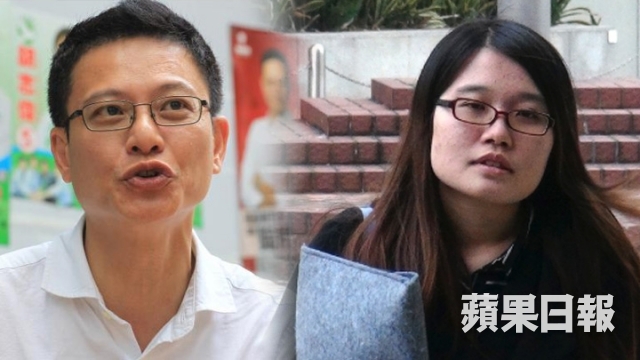
In the early hours today, the City University referendum to withdraw from the
Hong Kong Federation of Students was passed. During the vote tallying, it was
discovered that someone had tossed black ink into the ballet box to spoil the
ballots. This was alleged to have been done by the opponents of the referendum
goal.
Former Hong Kong University
Student Union president Yvonne Leung wrote on her Facebook page about the
ink-spoiled ballets: "I can guarantee that the ink was not poured by the
Federation of Students." Veteran student activist and former League of Social
Democrats chairman Andrew To replied: "Guarantee what? Why did you guarantee
anything about the withdrawal of Hong Kong University from the Federation?" A
commentator said: "Don't scold my Goddess!" Andrew To replied: "You're kidding!
Goddess! Emily Lau must be the Goddess among the Goddesses! Fuck!" Then he said:
"I wouldn't fuck Yvonne Leung even if she is offered to me."
The Stand News contacted Andrew To
who denied that he was insulting womankind. He thought that the attention is
being misplaced. He said: "What if I was cursing out Alex Chow? What if I were
homosexual?" He emphasized that he will not apologize to Yvonne Leung. "Why
should I apologize? Why didn't she apologize to the students of Hong Kong
University?"
The League of Social Democrats
said on its Facebook page: "With respect to what our member Andrew To said, we
made multiple inquiries today. After learning the details, we believe that
Andrew To's speech was inappropriate. We do not agree with what he said."
- With respect to what Andrew To
said, let me quote Lingnan University Student Union external affairs secretary
Lee Tak-hung on the Fuck the Police controversy:
"Freedom of speech exists on the school campus. It is a very important value
which must not be lost on the school campus. This affair has caused Lingnan
University to forever lose freedom of speech and expression." Therefore, I
give a big "FUCK-OFF" all you critics of Andrew To!
(SCMP)
May 14, 2015.
A pro-Beijing group, the Alliance
for Peace and Democracy - which led the anti-Occupy Central movement campaign -
has also been under fire. It claims to have gathered more than 360,000
signatures over the weekend in favour of the reform plan, but critics say those
who signed did not have to provide proof of identity, meaning they could sign
repeatedly or use fake names.
(Wen
Wei Po) May 16, 2015.
According to the Alliance for
Peace and Democracy, their "defend democracy, support constitutional reform,
oppose filibustering, oppose violence" signature campaign has collected 767,737
signatures as of 7pm on Friday, the eighth day of the campaign. Spokesperson
Robert Chow said that there should be no problem getting 1 million signatures in
total after this weekend.
In addition, the alliance said
that they handled 38,445 voter registration form. They had 24,859
volunteer-occasions and 3,978 booth-days.
(Wen
Wei Po) May 15, 2015.
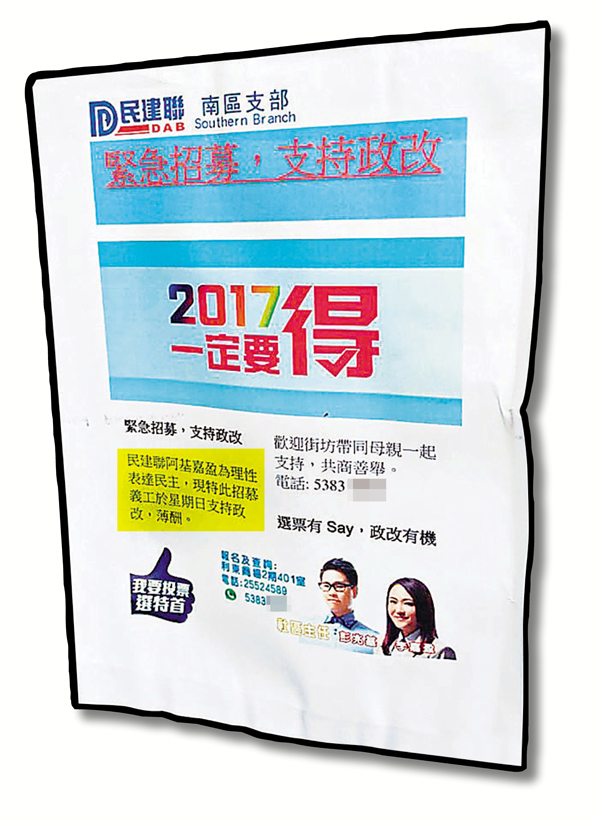
As the Alliance for Peace and
Democracy signature campaign rolled on, their opponents used dirty tricks to
disrupt.
On Sunday, DAB South District
branch director Pang Sui-kay and other volunteers were working a street booth at
Li Tung Estate. A Civic Passion member came up to them to harass them.
Democratic Party South District district councilor Au Nok-hin was also present.
The troublemakers left after five minutes. Later that afternoon, his volunteers
found almost twenty posters in Li Tung Estate and Yu An Court. These posters
were issued under the names of Pang Sui-kay and Lee Ka-ying for the DAB to pay
volunteers to support the constitutional reform. The contact phone number was
that for the DAB South District branch office. Pang said that the office has
received three phone calls so far. He condemned those who faked these posters:
"Even if you hold a different view on constitutional reform, there is no need to
do this." At this time, Pang and Lee have filed police reports.
On Saturday, the Alliance said
that someone holding a $500 bill approached their street booth in Kwai Ching and
asked the volunteers whether this was a fake bill. Then this individual took out
a mobile phone to take photos in order to fake a story. The Alliance condemned
such methods as being "immature and pointless."
(Oriental
Daily) May 16, 2015.
On this day, 20 plus members of
"Occupy Central does not represent me"/"Loyalist Civil Regiment" faced off Civic
Passion members first at the Tsim Sha Tsui clock towers. The groups met up again
in Sai Yeung Choi Street South pedestrian mall later. Regular demonstrators
Captain America was present waving his British colonial dragon-lion flag for
Hong Kong independence.
"Occupy Central does not represent
me"/"Loyalist Civil Regiment" accused Civic Passion for disrupting social order
in their violent anti-parallel traders demonstrations. Civic Passion said their
opponents don't under constitutional reform and work only for pay.
(Video)
https://www.youtube.com/watch?v=jVYMVqA-lOs One side yelled "Shit-eating
dogs" and the other side yelled "Bring down the Communists". Totally pointless
activities, because you can't bring down the Communists by yelling in front of
the clock tower in Tsim Sha Tsui, and because the other side won't eat shit
just because you told them to.
(Video)
https://www.youtube.com/watch?v=hOmg_Yr9N1g "Fairness, reason and
democracy" on display.
(SCMP)
Family blast police over handling of autistic man's arrest, detention. May 11,
2015.
The family of an autistic man wrongly
accused of murder and subjected to the full media glare as he was taken away
by police have slammed the force over the handling of his arrest.
The 30-year-old man was arrested on May 2
in connection with the killing of an elderly man in Sha Tin last month. His
family say they told the police he had mental-health problems and required
medication. But they claim the police pressed ahead.
Yesterday the man's older brother, surnamed
Au, said: "I told the police that my younger brother is autistic and
intellectually disabled, and that he must take medication according to a
doctor's instruction. "The police did not arrange any medical staff to treat
my brother. As a result, in the 50-hour-plus period he was detained from May
2 to 4, my brother did not take any medicine."
The younger brother was arrested on May 2
on suspicion of killing a 73-year-old man in a basketball court in Mei Lam
Estate. It was a highly publicised arrest. It was made after the old man
died in hospital on April 13 after an alleged assault by a younger man.
Police laid a holding charge against the
autistic man with one count of manslaughter last Monday, saying the case
would be mentioned at Sha Tin Court a day later. But hours later, just past
midnight, the holding charge was dropped. The arrestee was later released
because he had an alibi - he was staying in a Tuen Mun institute at the time
of the assault.
Under police guidelines, arrestees who have
pills on them should have their medical needs catered to, lawmaker Dr
Fernando Cheung Chiu-hung said. He claimed officers used leading questions
and failed to recognise his condition. "They asked him a lot of yes-no
questions like 'did you go to the basketball court', 'did you see the
elderly man' and 'did you push him' … the problem is autistic people have
the tendency to repeat what others say to them." The quiet release of the
man after his public arrest was unfair and potentially dangerous to him, as
he could be despised as a "killer" in the neighbourhood, Cheung added.
The family wants an apology and has called
on the police to step up training on how to handle the intellectually
disabled.
A police spokesman said that once evidence
suggested the man was not at the crime scene, he was released on bail on
Monday. When officers confirmed he was not there, he was released
unconditionally on Thursday. He said arrested people who did not feel well
could ask to go to hospital. However, the man in this case did not make a
request.
(Headline
News) From Now On, You Won't Err If You Don't Do Anything. By Wat
Wing-yin. May 14, 2015.
In the case of the 70-year-old man
who was murdered while walking a dog in Mei Lam Estate, Sha Tin, the police
arrested a 30-year-old autistic man earlier but released him uncondtiionally
after finding evidence that he was elsewhere at the time of the crime. The case
was hyped up by politicians and the media as the first bomb for the new police
commissioner to defuse. The case ended with an apology from the police.
I agree completely that when you
make a mistake, you must own up. It is also fair enough for limelight-seeking
politicians to hound you for false arrest and bullying the weak and vulnerable.
Yet, this case also showed that the police have an effective system in which the
arrestee was immediately released upon finding evidence that he was elsewhere at
the time of the murder. This showed that the system can protect the innocent far
better than those unfortunate people who rotted in American jails for decades
before being cleared. We should be happy that people who got arrested falsely
would suffer at most 72 hours.
The police are not gods. They
sometimes make mistakes. For political reasons, politicians seize this
opportunity to focus on this one mistake and attack. As a citizen, I am
concerned whether the police investigators tried to find the murderer. Did they
do everything possible to protect us?
When I read the newspapers, I saw
this: "... the police investigated for 19 days and viewed 800 hours of
Closed-Circuit Television videos in conjunction with testimony from local
residents to lock in on the suspect ..."
It is not easy to watch 800 hours
of CCTV videos. Even if you use fast-forward, it will take you four hundred
hours. If the police were really making an arbitrary arrest, would they have to
work so hard? They could have arrested all those who wore red clothes and black
pants, and beat confessions out of them.
This case is being discussed by
far too many rank amateurs. But when the senior officers have apologized, who is
going to continue the investigation? The law enforcement officers had wanted to
solve the murder case in order to render justice for the deceased old man. A
mistake was made and then all the efforts were tossed away. Worse yet, the
police were accused of making an arbitrary arrest. Henceforth, will the police
dare to do anything? If they don't anything, they can't ever err. If the
investigators did not watch the 800 hours of CCTV videos, they would not have
seen the wrong person, they would not have made any arrests, the police
commissioner would not be embarrassed ... if everybody does nothing, then
nothing can go wrong and the police can stay above the fray.
Politicians, you are going to
force the police to do nothing sooner or later. Then murderers will roam freely
in the streets. This is the bright new tomorrow that you are seeking for every
day.
(Ming
Pao) What Is News? By Wat Wing-yin. May 16, 2015.
An old man was killed while
walking a dog. Because the police arrested an autistic man by mistake,
bloodthirsty politicians and media distorted this into a major case of
authorities bullying the weak and vulnerable elements. Every day the newspapers
carried heavy coverage because they have finally caught the police off balance.
There will be a large demonstration by autistic persons this Sunday too.
Because I wrote a column on this
case in Headline News, I was also swept up. I was attacked by a number of Yellow
Ribbon websites with Internet bullying tactics, including vulgar language and
death threats to my whole family. I am used to this. I am unafraid. I am only
puzzled at why 700 words from one woman could draw such heavy attack. This is
like the Internet video about the execution of a North Korean soldier who dared
to talk back to Kim Jong-un.
My essay drew fire precisely
because it was spot on. My friend told me that my hit rate was too high, because
that essay was read by more than 700,000 persons. This is more than ten times
the circulation of Ming Pao. To take advantage of me, or perhaps because Ming
Pao is a Yellow Ribbon newspaper too, this self-proclaimed trustworthy newspaper
joined in the parade. Yesterday Ming Pao ran an article titled "Wat Wing-yin
rubbed salt into wound" with the sub-title "Wat Wing-yin declined to be
interviewed" to emphasize my popularity.
As I said, I am used to this and I
am unafraid. As a has-been celebrity, I wish the Ming Pao reporters, editors and
managers think carefully about: What is news? Internet verbal wars are not news.
That has nothing to do with the public, and nothing to do with the case. The
Internet media like to take people's words out of context and make a case. This
is inferior journalism. So why would a newspaper do the same? I have nothing to
say. How would you follow up on the Sha Tin murder case? The apology from the
police? The Internet quarrel? Does anyone at the newspaper know?
A reporter is supposed to report
the facts, not to promote his own prejudices; to bring justice, not to change
the focus. Has anyone mentioned the deceased person over the past few days?
While the autistic person deserves sympathy for his sufferings, who is going to
speak up for the deceased man? His story has completely vanished because he did
not know how to play politics or find a politician to help him.
(Sky
Post) The Worst Place on Earth to have a Revolution. By Wat Wing-yin.
May 14, 2015.
I have always thought that the
eyes of the people of bright-clear, so I always read the letters from the
readers and I reply to them as best as I could. Different people have different
ideas, and the collection becomes wisdom. On this day, a reader wrote me and I
was impressed by the ending paragraph:
"We frequently want to compare
ourselves with Singapore, but we don't seem to come up with any conclusions.
Under the leadership of Lee Kuan-yew, Singapore has become a player in the chess
game that is global (at least, Asian) politics. What about Hong Kong? Some
people in Hong Kong want to be the chess pieces for certain players in the chess
game that is global politics. Basically, they manage to do so. But shouldn't it
be clear who is better? Some people in Hong Kong want to see the Chinese
Communist regime collapse. But have they ever thought about whether nobody is
safe in that event? If a new regime takes over, there can be only one result: No
more Basic Law, no more one-country-two-systems. Will they let Hong Kong become
independent? You are just fantasizing. In summary, Hong Kong is the worst place
on earth to have a revolution. It is least necessary. Conditions do not allow
for a revolution. I hope that the people of Hong Kong won't lost their
direction."
On the worst place on earth to
have a revolution, they tried to have one. We can all see what happened.
A successful revolution ends in
regime change. That did not happen here. It proved that the revolution has
failed. A failed revolution usually ends with corpses strewn everywhere. That
did not happen here. It proved that the Hong Kong people are fortunate.
This is a place without natural
resources, a place that is not self-sufficient. Yet its has managed to be
prosperous and elegant. Apart from hard work, a little bit of luck is involved.
We are more fortunate than Singapore, because we have a big backer behind us.
Singapore is in the middle of a crocodile pond, and they worked hard for
everything that they earned. Meanwhile in Hong Kong, people want to compare
against Singapore. They even criticized them for being autocratic and
undemocratic. I think that this is something like Li Ka-shing's son comparing
himself against the son of Mr. Lee living in public housing estate in Ngau Tau
Kok. The one who has everything provided for already will never understand how
hard it is for the one whose every step is so hard.
(The
Stand News) May 15, 2015.
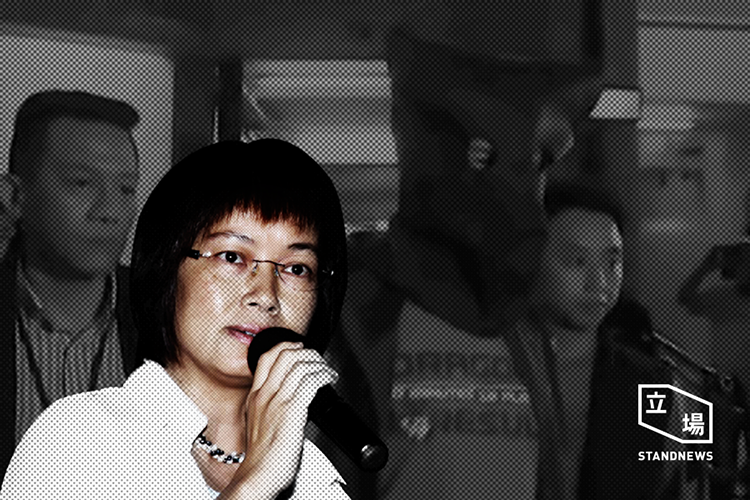
Among the popular essays on social
media must be the pro-establishment "From now on, you won't err if you don't do
anything" by Wat Wing Yin. It is hard to imagine that a media worker who grew up
and received education in Hong Kong could write such dog-farting trash to defend
her masters. The further I read, the more disgusted I got.
Can the police not arrest the
wrong persons? of course not. Sometimes, all the evidence point to one suspect
and the police file charges. But it is not unusual for key new evidence to
emerge to exonerate the suspect. Nobody would blame the police.
But clearly this case WAS NOT LIKE
THIS.
We are not going after whether the
police arrested the wrong person. Instead, the point was that the police was
completely unprofessional in their investigation. Instead, it was up to the
citizens of Hong Kong to sieve through the investigation process and see how an
autistic person was unreasonably treated by the police. In other words, he was
framed.
More crucial was the fact that the
victim had strong evidence that he was not present at the scene. But the police
ignored that evidence and filed charges against the victim. I find it
incomprehensible about how Ms. Wat saw this as how the police "perfectly
protected the victim." Instead I saw the police "hurting the victim without
cause." And let us not get into Ms. Wat saying that at least the victim should
be glad not to have to sit in jail for decades as in America. In Ms. Wat's eyes,
anyone sent wrongly to jail should be glad as long as they spend less than
several decades? If the real murderer goes free, will Ms. Wat feel very glad?
Today, Hong Kong society is rift
apart by the pan-democrats and establishmentarians? No, instead I see a contest
between civilization and barbarianism, a duel between logic and absurdity. The
sayings and writings of Ms. Wat astonish all those who possess normal logic and
civilized standards. You are free to be pro-Communists, but please exercise a
little bit of intelligence and logic if you want to convince me. When I observe
all the crazy talk and deeds from these pro-establishment people today, I fondly
remember Henry Fok saying: "I support Tung." That was simple and clear.
(Speakout
HK)
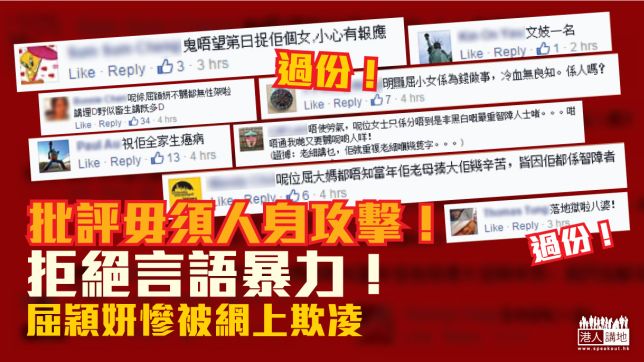
Internet comments:
- Someone is going to catch up
with her daughters and exact retribution.
- She is a writer who prostitutes
herself.
- This Wat Wing-yin has never had
any character. She speaks more like a beast.
- Clearly this Wat woman is
writing to make money. She is cold-blooded and conscience-free. Is she human?
- May her whole family get cancer!
- Don't get upset! This woman is
just a mentally impaired person who can't tell black from white. We don't have
to get angry over such people!
(Whatever her boss says, she will just repeat).
- This Wat woman has no idea how
difficult it was for her mother to bring her up, all because she is mentally
impaired.
(Speakout
HK)
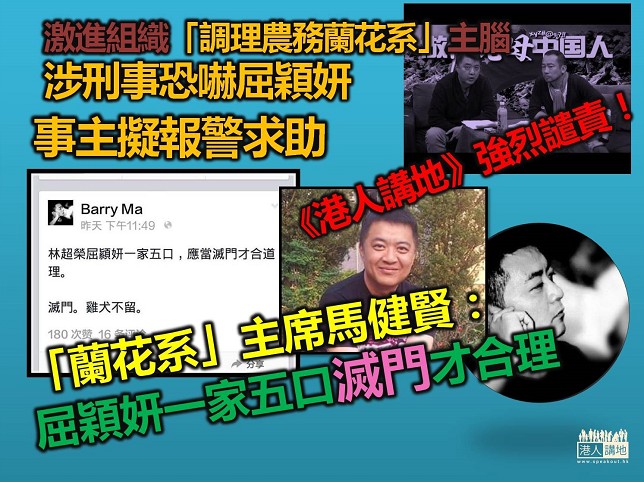
Renowned columnist Wat Wing-yin
writes many essays on current affairs, and she is unafraid of challenging the
so-called Hegemony of Democracy by pointing the evil that is wrought in the name
of democracy. Recently, Wat Wing-yin wrote an essay in Headline News titled
"From now on, you won't err if you don't do anything." She was immediately
attacked by certain pro-democracy activists. Apart from obscene language,
individual Internet users have directed venom against her entire family. Beyond
personal attacks, they issued curses and threats.
In particular, Barry Ma who is the
chairman of the notorious organization DLLM Orchid (which is a homonym for "Fuck
Your Mother's Stinking Rotten Cunt" in Cantonese) wrote on his Facebook: "Lam
Chiu-wing (the husband of Wat Wing-yin), Wat Ying-yin and her family of five
should be exterminated. Exterminated! Not even a pet will be allowed to live!"
According to information, Wat Wing-yin has decided to file a police report.
(Bastille
Post)
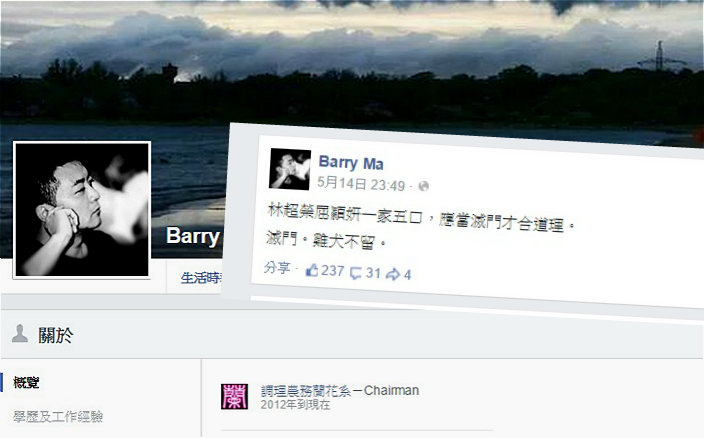
Wat Wing-yin wrote an essay <From
now on, you won't err if you don't do anything> on how the police handled the
case of the mentally impaired man who was erroneously accused of committing a
murder. She was subsequently attacked by radical pan-democrats. DLLM Orchid
chairman Barry Ma wrote on his Facebook: "Lam Chiu-wing (the husband of Wat
Wing-yin), Wat Ying-yin and her family of five should be exterminated.
Exterminated! Not even a pet will be allowed to live!"
According to information, Wat
Wing-yin has decided to file a police report.
Some pan-democrats have privately
said that such talk is very bad, but they decline to make public criticisms.
I have checked with legal
professionals. They said that this could be dangerous when someone actually acts
on what appears to be exercise of freedom of speech. In the case of the Sheung
Shui arson case, someone made a call for action on the Internet and other young
people actually went and did it. If someone read about "extermination" and
actually assaulted Wat Wing-yin or her family members, the person making the
loose talk will be guilty of aiding and abetting the crime.
(HKG
Pao) May 14, 2015.
I don't know when Hong Kong fell
into Yellow Terror. Anything that differs from Yellow Ribbon viewpoints is
drowned in invectives. If you don't want to succumb to the hegemony of the
pan-democrats, if you want to push aside the Yellow Terror in front of you, then
please join me to support Wat Wing-yin!
... In those reports, I did not
see any plausible cause. Instead I only saw hostility, hatred and invectives. In
truth, they were targeting Wat Wing-yin and not anything that she wrote. Because
Wat Wing-yin's writings are very popular because they speak out what Hongkongers
have in mind. She lets people see the other side which is different from the
pan-democrats' viewpoint. This aggravates the Yellow Ribbons. Naturally, they
will rise up to attack her. They want most of all to smear the police, silence
all dissidents and reduce society to Yellow Ribbon opinions only. But clearly
these are the most totalitarian even if they spout "democracy" all the time!
Yet democracy is not a
"one-message hall". Society needs different voices. You may not agree with
somebody's viewpoints, but you cannot use violence to bully them. At this
moment, I must speak on behalf of Ms. Wat: You are right! I support you! Tens of
thousands of readers are on your side. Please stand firm and speak up for Hong
Kong!
(Speakout
HK) May 18, 2015.
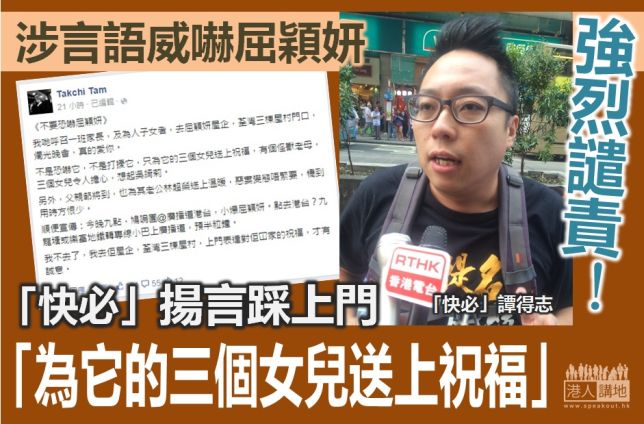
People Power's Tam Tak-chi wrote
on his Facebook: "I have going to summon a bunch of parents with their children.
We are going to Wat Wing'yin's home at the Sam Tung Uk Resite Village in Tsuen
Wan. Candlelight vigil. We really love you. We are not threatening it. We are
not disturbing it. We are just giving blessing to its three daughters. There is
a monster mother." He also wrote: I am going to her home in Sam Tung Uk Reiste
Village to give blessing to her whole family. That would show my sincerity."
According to information, Wat
Wing-yin has three daughters who are still in school.
(EJinsight)
What Chris Wat dropping her Ming Pao column means. May 20, 2015.
Ming Pao Daily celebrates its 56th
anniversary Wednesday. Some of its readers found an early cause for
celebration Tuesday when columnist Chris Wat Wing-yin, who holds relatively
conservative political views, decided to drop her column in the newspaper.
Wat cited attacks by internet users who
have opposing views. The media veteran, who was deputy chief editor of
pro-democracy Next Magazine a decade ago, has become a pro-government
loyalist in the past few years. The reaction to her latest comments on the
bungled police arrest of an autistic man in a murder case was the last
straw.
In a column published last week, Wat said
the public shouldn’t criticise the police so severely, as officers did a
good job by protecting the suspect in a safe place. She was referring to his
detention in a police station for 72 hours while being repeatedly
questioned. And it had already emerged that police went ahead and charged
the man even though they knew he had an alibi.
Hongkongers should praise the police for
how well they treated him, Wat wrote. “In other places, those who are
arrested would face even worse treatment,” she said.
Wat’s comments drew massive condemnation
from internet users, who said she was “cold-blooded” about handicapped
people and criticised her “blind support” for the police.
On Tuesday, she criticised Ming Pao for
putting on its front page a report about demonstrators who urged the police
to protect autistic and mentally handicapped people.
Wat said that she, too, felt she needed
protection. She said her views, which represented those of the silent
majority, had failed to win the respect of readers.
Wat said she was uncomfortable because the
personal safety of her family had been threatened by some internet users in
recent days. “Why should I need to suffer from such violence because I have
a different opinion from yours?” she wrote. In conclusion, she said she was
ashamed to be a columnist for Ming Pao given its readers’ reaction to her
columns.
She criticized the newspaper for losing its
editorial independence and credibility and becoming a mass newspaper like
Apple Daily. Wat said she hoped her
supporters would follow her and drop their subscriptions to Ming Pao after
she ceased writing her column.
Why did some readers celebrate Wat’s
decision to drop her column? They reminded Hongkongers that Wat had
criticized teacher Alpais Lam Wai-sze for her political stance, saying she
had set herself up as an activist so that the school where she taught would
face pressure from the public not to fire her.
Wat’s comments at the time sparked massive
criticism from Lam’s supporters.
There is no reason for newspaper editors to
cancel any column because of the writer’s political stance. A newspaper must
perform its public function as an open platform for the exchange of ideas
and opinions by writers and readers. At Ming Pao, writers of different
political persuasions speak up for their beliefs every day, without any
issues.
In Wat’s case, it is quite clear that the
writer failed to accommodate readers with different views, blaming the
newspaper’s editorial direction instead. But Wat should realize that what
the readers criticised about her was not her political stance or her
pro-establishment views. The point is that her comments were not supported
by facts.
Taking Lam’s case as an example, Wat
criticized her for keeping her job safe by making herself out to be an
outspoken teacher. In a column titled “A Good Job” last year, Wat said
getting a good job is easy today — just tell people you joined the Occupy
Central protest, or criticized the chief executive and the government or
joined the protests against them, and you have a “pro-democracy” shield.
Even if you don’t work hard, your boss will not dare to fire you, Wat wrote.
Hong Kong readers are wise enough to judge the value of articles published
in the newspapers.
The Wat case is a good lesson for writers:
they should be prepared to face public scrutiny for their comments and think
twice before they write them. They should also take responsibility for their
opinions instead of blaming readers with opposite views for badmouthing
them.
Ming Pao has been facing lots of pressure
externally and internally while trying to strike a balance between the
interests of readers and intangible political intervention from the north.
Wat’s decision not to continue writing
her column may be a tiny issue, but it reflects the difficulty the newspaper
faces in maintaining its neutrality.
The proposal for 2017 Chief
Execution election is controversial. This essay will address the issues in a Q&A
format.
Question: What is this
constitutional reform about?
Answer: Basically, it is letting the people get the vote. To a certain degree,
this means handing governance back to the people and let democracy take a step
forward in Hong Kong. Under the present system, a 1,200-person election
committee from four sectors determine both the nomination and election of the
Chief Executive. Under the proposed constitutional reform, this committee
becomes the nomination committee with the right to nominate the Chief Executive
candidates. Meanwhile, the right to vote is given to the 500+ million qualified
voters. The 1,200-person nomination committee will go through two steps. In the
first step, the committee recommends the nominees. In the second step, the
candidates who get more than half of the committee votes become the candidates.
Two to three candidates will contest in the general election. The highest
vote-getter will be winner, to be appointed by the Central Government.
Currently, Hong Kong citizens have the right to elect District Councilors
and Legislative Councilors. The constitutional reform gives the additional right
to elect the Chief Executive. Since the Hong Kong political system is based upon
administrative leadership, the election of the Chief Executive is much more
important than those for Legislative Councilors or District Councilors.
Question: Why is the
constitutional reform a step forward for democracy in Hong Kong?
Answer: The core value of democracy is that the will of the people can be
expressed and respected. The vote is the most effective tool to express the will
of the people. This is a civilized, rational and peaceful way of expression.
Through their votes, the people have their say. Without the right to vote, there
is no democracy. While there are other ways for the people to express their will
(e.g. speech, press, assembly, demonstrations), fewer people choose to do so
than casting votes.
Question: What good does it do for
citizens to have the right to elect the Chief Executive?
Answer: The Chief Executive will be responsible to whosoever elected him/her.
When the Chief Executive is directly elected by voters (and not by the
1,200-person election committee), he will be directly responsible to the
citizens of Hong Kong. "The voters shall be the boss." Those who have the right
to vote (citizens) and he/she who is elected by those voters will have a
master-servant relationship. When there are two or more candidates, the
candidates must do everything possible to come up with a policy platform that
can appeal to the voters. For the citizens, this is a beneficial kind of
competition. Since the majority of the voters are middle-class and lower-class,
the policy platform are likely to be more geared towards than when the voters
are just the 1,200-person election committee. Such a Chief Executive is likely
to be more understanding of social problems.
Question: Why are the
pan-democrats staunchly opposed to the proposed constitutional reform?
Answer: We can use three choices (A, B or C) to illustrate the crux of the
constitutional reform, with A being the best, C being the worst and B being
between the two extremes. The existing Chief Executive election system (called
"small-circle election" by the pan-democrats is a Type-C system. The
pan-democrats hope to get a Type-A system (a genuine universal suffrage that
meets international standards, no unreasonable restriction on the right to run
for election and no screening of candidates). The government's proposal is a
Type-B system.
Some pan-democrats think that B is
worse than C and should not be accepted. Other pan-democrats think that B is
better than C, but they still don't want B on the assumption that "if they
pocket it now, they may have to pocket it forever." That is, if they accept B,
they will never get A.
My opinion is that B is better
than C because it more democratic. Once we upgrade the system from C to B, the
pan-democrats can continue to strive towards A (including democratizing the
Chief Executive nomination committee as well as the Legislative Council itself).
From the viewpoint of human
historical experience and one-country-two-systems, this sort of gradualism is
more feasible than the pan-democrats' "one step process" from C to A.
Furthermore, if the pan-democrats want to abandon the immediately available B
for the sake of the remote possibility of A, the result will be that the
citizens will continue to endure C, which the pan-democrats describe as an
extremely undemocratic system. Are the pan-democrats making the
entire citizenry pay too high a price? This price includes the continued stalling of
governance, the paralysis of the Legislative Council due to filibustering, the
slowdown of society and the downfall of Hong Kong.
Question: Why do some
pan-democrats think that B is worse than C?
Answer: Their usual points of discussion are as follows:
(1) The candidates under Proposal B are "rotten apples" and "rotten oranges" who
won't be welcomed by the citizens;
(2) The voters will be turned into "voting machines" to confer legitimacy to the
officially anointed Chief Executive and give him an aura of popularity. Thus,
this is a false universal suffrage.
On Point (1), I believe that this is stretching it too far. We still don't know
how the nomination committee will work. So why imagine the worst? Why not begin
with assuming that the apple and the orange are both delicious? Why not try to
give the nomination committee a chance?
As for Point (2), my understanding that this high threshold was designed not
because the Central Government wants to decide who the two or three candidates
shall be. Instead, they only want to reduce the chance of those whom the Central
Government do not want to appoint as Chief Executive because those people will
regard fighting against the Central Government as their goal. Thus, the
nomination committee is allowed to use the secret ballot to vote on the two to
three candidates who will have both the trust of the Central Government as well
as the support of the people of Hong Kong. I don't agree that this is creating a
false popular support. In fact, such an assertion is disrespectful to the voters.
Hong Kong is not North Korea. Hong Kong is a free and open society. After the
citizens learn about the candidates, they can freely decide whom to vote for, or
cast a blank vote, or decline to vote. Therefore the election results will let
the world know about the genuine and free expression of the will of the people.
That would be the true public opinion, no matter whether you want to call this
genuine or false universal suffrage.
Question: The pan-democrats
believe that they were elected as representatives and they only need to vote in
accordance with their own political beliefs and conscience without being
persuaded by the majority opinion. Do you agree?
Answer: The right to vote for the Chief Executive is a basic civil right. It is
an inviolable human right. The majority in society should not deprive the rights
of minorities. A minority group (or those Legislative Councilors who represent
them) should not be able to deprive the majority of their human rights.
Currently, some public opinion polls show that about half the citizens want to
be able to vote for the Chief Executive in 2017 in under the proposed
constitutional reform. That is, 2.5 million out of 5 million qualified voters.
The 27 pan-democratic Legislative Councilors will each one of them nullify the
right of 90,000+ voters' right to vote. Does this match the notions of democracy
and human rights? Those citizens who oppose the constitutional reform can
abstain or cast null votes to express their discontent. They do not need to take
away the votes of those who would like to be able to vote.
Question: Apart from the right to
vote, is the right to be elected also a basic civil right?
Answer; Yes. The Central Government insists that the Chief Executive must "love
China and Hong Kong" and therefore they want a higher threshold to restrict the
candidates. The pan-democrats objected and are even willing to veto the proposal
such that the citizens won't have the right to vote. Such is the predicament of
democracy in Hong Kong under one-country-two-systems.
(am730 via
Speakout HK) May 14, 2015. By Ko Ming-ya.
As the debate over constitutional
reform heads towards a stalemate, I watched Civic Party's legislator Kwok Wing-hang said confidently on television that after the pan-democrats veto the
constitutional reform bill, they will be able to apply pressure on the Central
Government with a resounding majority victory in the 2016 Legislative Council
elections. Thus, the Central Government will be forced to reconsider the August
31 National People's Congress Standing Committee resolution. Yet, an informed
party said that this is wishful thinking that is quite impractical.
Kwok said: "If we veto the
proposal now and if we can get even more seats in the 2016 Legislative Council,
that would be a clear message from the citizens to the Central Government that
we do not accept the August 31 resolution. Politically and legally, they will
have to reconsider. In politics, you never say 'never'." Logically, this
statement is problematic, because it sounds more campaign talk than practical
analysis. Many public opinion polls have shown that more citizens support than
oppose the constitutional reform proposal. If the pan-democrats run against
public opinion and veto the bill, why would the citizens continue to support
those legislators who refuse to listen to public opinion? Even if the gap
between support and opposition is closing, it seemed fantasy to think that the
pan-democrats can obtain an overwhelming majority in the Legislative Council.
The source also pointed out that
Kwok and other pan-democrats have ignored a key point. The reason why
constitutional reform is stuck now is that the Central Government and the
pan-democrats lack mutual trust. In particular, the Central Government distrusts
the radical elements and the pro-western elements within the pan-democratic
camp. Out of concern for national security, the Central Government will not
yield. Meanwhile the pan-democrats do not trust the government to genuinely
allow universal suffrage, and they think that "pocket it now" means "pocket it
forever" without any room for future improvement. If the two sides cannot build
mutual trust now, how do you expect the Central Government to trust the
pan-democrats more after the constitutional reform bill is vetoed? What can make
the Central Government come up with a less restrictive framework?
Even if the pan-democrats win more
Legco seats, will that create pressure on the Central Government? Will the
Central Government restart the constitutional reform process? Will they retract
the August 31st framework? Besides, more pressure will merely create more
deadlock? Without mutual trust, it will be a re-run of the current situation, or
even worse.
(Hong Kong Daily News via
Speakout HK) May 14, 2015.
The pro-establishment camp is
pushing hard for the constitutional reform. If the 2017 Chief Executive election
should be done by one-person-one-vote, the pro-establishment camp would not be
the most direct beneficiaries. Instead, the citizens will benefit the most. In
other words, if the current 1,200-person election committee is retained, the
pro-establishment camp should be able to hold onto their "turf". Furthermore, if
the Legislative Council elections are held using the same system, those in the
functional constituencies won't suffer at all. The only problem is that our
society will be mired in endless quarrels.
But do the pan-democrats really
want one-person-one-vote for Chief Executive? The answer is not clear. Those who
claim that they oppose "Pocket it first" because they want genuine universal
suffrage seemed irrational. "Pocket it first" should consolidate their political
powers. But pan-democrats are pan-democrats because they oppose. If the 2017
Chief Executive is elected by one-person-one-vote, the winner will have the
backing of several million votes. As a result, pan-democrats won't be able to
call this person "689" or "small-circle election winner." That would be very
unsatisfactory to pan-democrats. Instead, if the old election system is
retained, those pan-democratic stakeholders can consolidate their existing
powers and not be displaced by new powers. While they go around touting genuine
universal suffrage, they clearly know there there is no such standards, they
know that having the new is better than the old, and they know what people want.
But they can't let that happen.
(The
Nanfang) Hong Kong’s Divided Pro-Democracy Camp Left With Few Options.
By Suzanne Pepper. May 12, 2015.
The “three R’s” advice – Retreat, Regroup,
Return – came from Apple Daily‘s Jimmy Lai Chee-ying midway through
last year’s Umbrella/Occupy street blockades. The advice went unheeded, of
course, and he sat it out with protesters until December when police finally
hauled away the last remaining holdouts.
All things considered, he was right. It
would have been better for their cause had demonstrators followed Lai’s
advice when he gave it and staged an orderly forward-looking strategic
retreat. Sympathetic observers generally agreed that the street sit-ins were
an effective means of protest at first but then went on for too long,
pursued unrealistic goals that could not be achieved by the means adopted,
and allowed adversaries to gloat over the “failure” of Hong Kong’s longest
most dedicated campaign for democratic elections.
Beijing has yet to budge on any
part of its restrictive August 31 (8.31) decision that precipitated the street
occupations and Chief Executive Leung Chun-ying probably never even thought once
about resigning as protesters demanded. Even worse, say the concerned observers,
Hong Kong’s democracy movement is now fragmenting again into all the disparate
pieces that came together suddenly last year on September 28 when the street
sit-ins began. In fact, there are even more disparate pieces now than before.
Downcast and discouraged everyone surely is
but the pessimism is premature. Hong Kong’s democracy movement might be
receding back into another period of irrelevance, as has happened many times
before. This current phase is only the latest local agitation in a long
sequence of abortive political reform efforts that extend back to the
British colony’s earliest days.
Or the movement might inadvertently be
doing just what Jimmy Lai suggested, since the disarray is not random. The
new line-ups are being driven by fears about premature compromise and
capitulation and no one is willing to bet the fears are unfounded. Hence the
disarray is also being driven in anticipation of the need for a renewed
pushback against mounting pressures to accept Beijing’s design for Hong
Kong’s political future.
The movement is splitting and Beijing is
trying – with some success – every means possible to exploit the divisions.
Yet without them the movement would be even more likely to dissipate. It
might still, but if anything comes of this struggle beyond what Beijing has
so far been willing to offer, then much credit must go to the energy of the
younger generation that is doing what it can to hold Hong Kong’s aging
pro-democracy veterans to their pledges.
Earlier this year Yvonne Leung Lai-kwok
responded to questions during an informal gathering of sympathetic
observers. Leung was last year’s University of Hong Kong student body
president. She was also one of the student leaders who stepped into the void
last September when Professor Benny Tai’s Occupy Central idea took off
without him.
The older generation stood aside then and
let students take the lead because they had come forward right after Beijing
announced its 8.31 decision, when Benny Tai was blindsided by Beijing’s
intransigence and seemed uncertain about going through with his carefully
rehearsed street occupation protest. It had actually been planned to last
only a few days. The police had also rehearsed their removal tactics, so the
whole exercise was supposed to have been short-lived. One reason it wasn’t
was that the students were not alone.
They took the initiative at the head of a
much larger grouping that had already been planning to follow Benny Tai’s
lead. This is the Civil Human Rights Front that organizes the annual July
First protest marches, a new tradition that began in 2003. All kinds of
single-issue concern groups unite on that day around their one common cause
as champions of Hong Kong’s civil liberties. It is also a march were
political parties and elected politicians take a back seat. They join but
never in the lead. This custom has developed in deference to ever-present
suspicions and accusations about politicians exploiting idealistic goals for
opportunistic purposes.
The politicians were criticized by some
last year for not playing a more direct leadership role in the occupy
movement. The reasons derive from this endemic suspicious tradition and not
necessarily from lack of courage.
Yvonne Leung retold the story about how the
all-city student leaders realized after a month or so that it was time to
de-occupy. But like Jimmy Lai, the students could not convince everyone else
that it was time to go and, also like Jimmy Lai, they couldn’t just walk
away; a leaders’ retreat while the ground troops stayed behind on the street
to face police clearing squads alone.
Those divisions are now reasserting
themselves with some students and some others deciding to go their separate
ways. The basic division remains, between “radicals” and “moderates,” for
want of better words to describe them. Only this is not just a division
between young and old or students and non-students, although it is both. But
it’s also appearing among the students themselves as well as between and
within different political groups and parties, more like a rebellion from
below – between leaders and the rank-and-file – than anything else.
Most dramatic is the disarray within the
all-city Hong Kong Federation of Students that played the lead role in
Umbrella/Occupy. With over half a century of controversial history to its
credit (the British thought it was a hotbed of pro-China pro-communist
radicalism in the 1970s), the HKFS until recently represented students at
all eight government-funded tertiary institutions here. Students at several
universities have just held referendums to decide whether to go it alone or
remain within the federation.
So far, four universities have voted to
disaffiliate: the University of Hong Kong was first to go followed by
Polytechnic University, Baptist, and City university. The latter voted on
May 7. The Chinese University’s referendum had to be aborted after
supporters fumbled the preparatory signature campaign. They say they’ll try
again next semester. Of those voting, only one, Lingnan University, has
remained within the federation.
Students say they have many grievances
stemming from the 79-day Occupy protest, lesser complaints like lack of
adequate consultation and disagreements over tactics. Leaders are
“undemocratic” – being only indirectly elected by the various student bodies
– didn’t pay enough attention to the views of everyone else, and so on. But
the more basic underlying reason seems to be the moderation of HKFS leaders
themselves, allegedly too intent on trying to win official concessions, too
fixated on the unprecedented student debate with officials in mid-October.
Without follow-up plans for what to do next, they are too inclined to listen
to the professional politicians. These were helping out behind the scenes,
with logistics and office space in the Legislative Council building just
adjacent to the main Harcourt Road tent-city encampment.
Of greater importance to the democracy
movement as a whole, however, are two additional decisions that have just
been made. On April 27, the remaining members of the HKFS – in deference to
the new climate of dissent – decided that the federation will not be among
the sponsors of this year’s annual June Fourth memorial vigil in Victoria
Park.
The event commemorates Beijing’s 1989
crackdown on its own 1980s democracy movement and the HKFS has been among
the sponsors every year since. Attendance has continued to grow, bolstered
by increasing numbers of cross-border travelers and mainland students who
want to experience an event that is banned everywhere else in China.
Last year was the first when the growing
mood of antagonism among local activists toward mainland influence had a
noticeable impact on June Fourth commemorative events. Dissenters held their
own rally across town with several thousand attending … police said 3,000,
sponsors said 7,000. The basic theme was meant as a direct challenge to the
mainstream Victoria Park event. It has always mourned the demise of the
1980s mainland democracy movement along with the violence in Tiananmen
Square on June Fourth and has retained “down with one-party dictatorship” as
a (more-or-less) constant slogan.
This year attendance at the counter-current
rallies will be higher because the HKFS will be joining them rather than the
Victoria Park event. We need not concern ourselves with democratizing the
mainland and patriotic unification themes, say the dissidents. Protecting
Hong Kong from the encroaching influence of mainland political ways and
means should be our first priority. Ironically, Beijing might now see more
to its liking among the Victoria Park crowd than the autonomy-first outliers
who are vilified daily in the pro-mainland media as traitorous seekers of
independence.
Finally, as if all that was not enough, the
youngsters have just dealt another blow to the old guard. Young Joshua Wong
Chi-fung, a freshman college student, was the hero of the 2011-12
anti-patriotic education protest and is now much more besides. He has just
led his old middle-school student group, Scholarism, out of the informal
coalition that was preparing to campaign for veteran Democratic Party
legislator Albert Ho Chun-yan who is planning to resign his Legislative
Council seat. Ho’s idea is to use the subsequent by-election as a protest
referendum against the Hong Kong government’s electoral reform bill based on
Beijing’s 8.31 decision.
In a statement released on April 28,
Scholarism said it had decided not to participate in the referendum
campaign, which has been building into an extension of last year’s
Umbrella/Occupy movement. The reason: Scholarism wanted to distance itself
from the professional Legislative Council politicians some of whom now seem
to be losing their nerve and not sufficiently determined in their vow to
veto the government’s electoral reform bill. The group decided to pull out
in order to free itself from the constraints they anticipated within the
by-election campaign. Key to the decision was a commitment they would have
had to make about holding in abeyance all disagreements with the democratic
camp.
The support coalition had initially
included five political parties, plus Scholarism, and the HKFS. The latter’s
participation is now also in doubt as is Albert Ho’s resignation project
itself since it was counting on the students to provide a major source of
enthusiasm and energy.
So the retreat and regrouping have now been
accomplished. All that remains of Jimmy Lai’s “three R’s” advisory is the
third part: return – the most difficult stage of all. The question is how to
return and how best to use what little time remains in this long running
debate.
The government’s reform bill based on
Beijing’s 8.31 decision will be voted up or down before the coming summer
recess within the next two months. Consequently, attention is now focused on
the simple up or down choices that must soon be made, on the public’s
opinion about those choices, and its impact on the 27 pro-democracy
legislators’ vow to veto.
The government’s saturation-style promotion
campaign has moved into high gear and seems to be registering some success.
Pan-democrats are on the defensive as they take up their street-corner
positions with fliers and stump speeches. And listening to their talking
points, it seems clear why they are not “closing the sale” with a winning
argument.
A poll was commissioned by TVB in late
April, soon after the Hong Kong government released its final version of the
2017 electoral reform plan based on Beijing’s restrictive 8.31 decision.
Close to 51 percent of the 1,000+ people polled said “pocket it.” The
results: 50.9 percent said pass the bill; 37.9 percent said veto it; 11
percent were undecided.
But when the respondents in the same poll
were asked whether they actually liked the government’s proposal, 35.5
percent said they did not; 35.3 percent said they did; and 25.1 percent were
undecided. Seems like about 15 percent of the respondents would like some
good reasons not to pass the bill but hadn’t yet heard them.
A similar gap appeared in the first results
of the three universities’ tracking poll that began in late April. This poll
is being conducted by three universities with reliable polling reputations:
the University of Hong Kong, Chinese University, and Polytechnic, with
results announced every Tuesday. The first two announcements on April 28 and
May 5, were virtually identical. The latter showed 47.6 percent in favor of
passing the bill; 36.4 percent said veto.
Unfortunately for democracy movement
campaigners, their closing summations seem weaker than their openers.
Pro-democracy legislators know what their constituents can do to them if
they backtrack now. The Democratic Party’s experience after Albert Ho’s
sudden compromise decision in 2010 over a minor Legislative Council
electoral reform bill remains uppermost in everyone’s mind. As a result of
that 2010 decision, many of its members quit the Democratic Party, voters
punished its candidates in the 2012 Legislative Council elections, and
Albert Ho later said the abuse he received all along the route of the July
1, 2010 protest march transformed it into the “worst experience” of his
entire life.
With that experience in mind, pan-dem
arguments now seem directed primarily at their own constituents in an effort
to try and reassure them that last-minute deals will not be done. But to do
that, campaigners are invoking arguments that are not likely to get very far
with people on the margin who don’t yet understand why the bill should not
be accepted, even though they don’t like it. The government’s line that “we
know it’s not perfect, but it’s the best we could do under the circumstances
and think how wonderful it will be to vote for your own Chief Executive,
etc., etc. … ” seems to be working.
In contrast, pan-dem legislators are
invoking the hallowed argument about voting their conscience regardless of
the opinion polls. Alternatively, pan-dem legislators are adopting a
legalistic argument: since the Basic Law requires a two-thirds majority vote
in Legco to pass the electoral reform bill, then a one-third public opinion
poll reading will be sufficient to justify their veto.
The explanations that might have followed
from the initial catchy “pocket it forever” 【戴一世】retort to the government’s
“pocket it first” 【戴住先】slogan are not being expanded and emphasized. Those
explanations should be emphasizing Beijing’s insistence that 8.31 is as far
as it has to go in meeting its Basic Law constitutional obligation for
universal suffrage Hong Kong elections.
Such arguments should be asking why Beijing
refuses to provide any other definitions for future, post-2017, elections
beyond the vague Basic Law phraseology “if there is a need.” The Barristers’
have just returned from their biannual visit to Beijing where they seem to
have inquired only about what “if there is a need” might mean, but not
whether Beijing would ever allow a free-choice Chief Executive election
here. If they have just fatalistically accepted that the latter is
impossible, as some are now suggesting, then why isn’t the public being let
in on that secret?
Such explanations should also be spelling
out in detail how easy it will be for Beijing to engineer a candidate
line-up that will give current Chief Executive Leung Chun-ying a clear
popular mandate. There can only be three candidates. If he is one and Regina
Ip is the second, who might qualify to give pan-dems a “chance,” as
loyalists are saying.
And such arguments should be pointing out
that “universal suffrage” elections are common all over China today, all
with same inbuilt Communist Party control mechanisms that are present in
Beijing’s 8.31 decision for Hong Kong’s Chief executive election in 2017.
The voting public there is endorsing and giving credibility to the party’s
candidates. If that is the future Beijing is planning for Hong Kong, then
maybe Hong Kong voters would like to know before they advise their
legislators to “pocket it first” and worry about the consequences later.
Q1. Some people feel that they
would rather the Legislative Council not pass the 2017 Chief Executive election
proposal due to too many restrictions on candidacy. Other people feel that they
want universal suffrage for Chief Executive election in spite of those
restrictions. Whom do you agree with?
41.7%: Prefer not passed
50.8%: Prefer passed
4.7%: Neither
2.4%: Don't know/no opinion
0.4%: Refused to answer
Q4.1. If the government's proposal
is augmented by: "The National People's Congress Standing Committee promises
that it may change the Chief Executive election method after 2017."
25.7%: Prefer not passed
62.9%: Prefer passed
4.7%: Neither
5.9%: Don't know/no opinion
0.7%: Refused to answer
Q4.2. If the government's proposal
is augmented by: "The group/corporate voters will be eliminated such that the
nomination committee will only have individual voters."
15.8%: Prefer not passed
74.1%: Prefer passed
4.7%: Neither
4.7%: Don't know/no opinion
0.7%: Refused to answer
Q4.3. If the government's proposal
is augmented by: "When the majority of votes do not go to any one of the Chief
Executive candidates, the election shall be declared null and void."
19.5%: Prefer not passed
70.6%: Prefer passed
4.7%: Neither
4.5%: Don't know/no opinion
0.7%: Refused to answer
Q5. Some people think that if the
government's proposal is not passed, then the Chief Executive election in 2017
will be using the previous method (without universal suffrage). Other people
think that if the proposal is not passed, the constitutional reform process can
restart so that a more democratic election method can come about. Whom do you
agree with?
43.8%: Agree with the former
39.8%: Agree with the latter
10.6%: Neither
5.8%: Don't know/no opinion
0.0%: Refused to answer
Q6. Some people think that if the
government's proposal is not passed, then the 2020 Legislative Council election
method won't be changed either. Other people think that if the government's
proposal is not passed, the constitutional reform process can restart so that a
more democratic election method for the 2020 Legco election can come about. Whom
do you agree with?
42.6%: Agree with the former
40.2%: Agree with the latter
9.5%: Neither
6.9%: Don't know/no opinion
0.7%: Refused to answer
Q7. Some people think that even if
persons of certain political persuasions are excluded, it is still meaningful to
have one-person-one-vote to elect the Chief Executive. Other people think that
persons of certain political persuasions will be excluded as candidates and that
would render the one-person-one-vote election of Chief Executive to be meaningless.
Whom do you agree with?
41.7%: Agree with the former
47.9%: Agree with the latter
6.0%: Neither
3.7%: Don't know/no opinion
0.7%: Refused to answer
Q8. What are the odds of the
Legislative Council passing the government's proposal for the 2017 Chief
Executive election?
17.2%: Very high
31.0%: Very small
48.0%: Half/half
3.3%: Don't know/no opinion
0.5%: Refused to answer
Q9. Some people think that if
universal suffrage is not realized for the 2017 Chief Executive election, Hong
Kong will sustain huge damages in terms of politics, economy and society. Other
people think if universal suffrage is not realized for the 2017 Chief Executive
election, Hong Kong will continue operating as usual. Whom do you agree with?
32.7%: Agree with the former
58.4%: Agree with the latter
5.6%: Neither
3.2%: Don't know/no opinion
0.1%: Refused to answer
Q10. If one-person-one-vote will
be used to elect the Chief Executive in 2017, who would you like to see become
the Chief Executive?
5.5%: Carrie Lam
3.6%: Audrey Eu
3.1%: CY Leung
3.1%: Jasper Tsang
2.2%: Regina Ip Lau Suk-yee
2.1%: Alan Leong
2.0%: Anthony Leung
1.6%: Henry Tang
1.6%: Anson Chan
1.6%: Leung Kwok-hung
Q11. In the upcoming Legislative
Council, how important is the position of the candidate on the constitutional
reform issue?
27.9%: Very important
42.0%: Important
15.7%: Half-half
8.0%: Unimportant
1.7%: Very unimportant
1.6%: Not applicable (e.g. not a voter; does not intend to vote)
2.9%: Don't know/no opinion
0.2%: Refused to answer
Q12. Suppose that you are likely
to vote for a certain Legco member but his vote on the government's proposal for
the 2017 Chief Executive election is the opposite of your wishes. Would you vote
for him in the Legco election?
52.4%: Definitely not
38.7%: Not definitely not
3.4%: Not applicable (e.g. not a voter; does not intend to vote)
5.4%: Don't know/no opinion
0.1%: Refused to answer
Q13. How would you characterized
your political leaning?
23.5%: Pro-establishment
32.0%: Pan-democratic
41.2%: Neither
3.1%: Don't know/no opinion
0.2%: Refused to answer
Do you support or oppose the government’s
proposal on CE election of 2017?
調查日期
Survey date |
樣本人數
Total Sample |
支持
Support |
反對
Oppose |
一半半/唔知/難講/不認識方案內容
Half-half / Don’t know / Hard to say
/ Don’t know about the proposal |
支持淨值
Net support |
|
23-27/4/2015 |
1,167 |
46.7% |
37.6% |
15.8% |
9.1% |
|
24-28/4/2015 |
1,154 |
47.6% |
36.7% |
15.7% |
10.8% |
|
25-29/4/2015 |
1,147 |
49.5% |
35.7% |
14.8% |
13.8% |
|
26-30/4/2015 |
1,154 |
48.2% |
36.8% |
15.0% |
11.4% |
|
27/4-1/5/2015 |
1,163 |
47.6% |
36.4% |
16.0% |
11.2% |
|
28/4-2/5/2015 |
1,162 |
46.2% |
38.0% |
15.8% |
8.2% |
|
29/4-3/5/2015 |
1,147 |
45.2% |
37.9% |
16.9% |
7.3% |
|
30/4-4/5/2015 |
1,162 |
44.4% |
39.1% |
16.4% |
5.3% |
|
1-5/5/2015 |
1,150 |
43.7% |
40.2% |
16.1% |
3.5% |
|
2-6/5/2015 |
1,159 |
44.8% |
38.7% |
16.5% |
6.1% |
|
3-7/5/2015 |
1,157 |
42.5% |
39.5% |
18.0% |
3.0% |
|
4-8/5/2015 |
1,152 |
42.9% |
39.8% |
17.3% |
3.1% |
|
5-9/5/2015 |
1,130 |
42.3% |
40.3% |
17.3% |
2.0% |
|
6-10/5/2015 |
1,122 |
44.3% |
38.8% |
16.9% |
5.5% |
|
7-11/5/2015 |
1,106 |
43.7% |
40.6% |
15.7% |
3.0% |
|
8-12/5/2015 |
1,105 |
46.9% |
37.9% |
15.2% |
9.0% |
|
9-13/5/2015 |
1,116 |
46.8% |
38.9% |
14.3% |
7.9% |
|
10-14/5/2015 |
1,129 |
47.0% |
38.9% |
14.2% |
8.1% |
|
11-15/5/2015 |
1,140 |
45.8% |
40.1% |
14.1% |
5.8% |
|
12-16/5/2015 |
1,142 |
46.3% |
39.0% |
14.7% |
7.3% |
|
13-17/5/2015 |
1,142 |
44.2% |
40.8% |
14.9% |
3.4% |
|
14-18/5/2015 |
1,148 |
45.7% |
39.1% |
15.2% |
6.5% |
|
15-19/5/2015 |
1,142 |
45.8% |
38.5% |
15.7% |
7.3% |
|
16-20/5/2015 |
1,133 |
46.4% |
36.5% |
17.1% |
9.9% |
|
17-21/5/2015 |
1,126 |
46.0% |
36.4% |
17.5% |
9.4% |
|
18-22/5/2015 |
1,123 |
47.7% |
34.5% |
17.9% |
13.2% |
|
19-23/5/2015 |
1,111 |
44.0% |
37.1% |
18.9% |
6.9% |
|
20-24/5/2015 |
1,117 |
43.5% |
36.8% |
19.7% |
6.7% |
|
21-25/5/2015 |
1,110 |
44.3% |
37.3% |
18.4% |
7.0% |
|
22-26/5/2015 |
1,111 |
42.9% |
38.6% |
18.5% |
4.3% |
|
23-27/5/2015 |
1,115 |
43.5% |
38.7% |
17.8% |
4.9% |
|
24-28/5/2015 |
1,116 |
45.3% |
36.2% |
18.5% |
9.2% |
|
25-29/5/2015 |
1,107 |
45.9% |
35.2% |
19.0% |
10.7% |
|
26-30/5/2015 |
1,117 |
44.4% |
36.2% |
19.4% |
8.2% |
|
27-31/5/2015 |
1,121 |
47.9% |
34.5% |
17.6% |
13.4% |
|
28/5-1/6/2015 |
1,118 |
45.7% |
35.6% |
17.7% |
11.1% |
|
29/5-2/6/2015 |
1,117 |
45.3% |
37.6% |
17.0% |
7.7% |
|
30/5-3/6/2015 |
1,115 |
45.6% |
39.7% |
14.6% |
5.9% |
|
31/5-4/6/2015 |
1,119 |
45.8% |
39.6% |
14.7% |
6.2% |
|
1-5/6/2015 |
1,121 |
43.7% |
41.5% |
14.7% |
2.1% |
|
2-6/6/2015 |
1,118 |
42.8% |
42.8% |
14.5% |
0.0% |
|
3-7/6/2015 |
1,115 |
41.7% |
43.0% |
15.3% |
-1.3% |
|
4-8/6/2015 |
1,129 |
41.6% |
43.4% |
15.1% |
-1.8% |
|
5-9/6/2015 |
1,117 |
41.3% |
44.0% |
14.6% |
-2.7% |
|
6-10/6/2015 |
1,117 |
42.9% |
42.4% |
14.7% |
0.5% |
|
7-11/6/2015 |
1,112 |
42.6% |
41.7% |
15.7% |
1.0% |
|
8-12/6/2015 |
1,123 |
44.9% |
40.9% |
14.2% |
3.9% |
|
9-13/6/2015 |
1,111 |
44.2% |
40.9% |
15.0% |
3.3% |
|
10-14/6/2015 |
1,112 |
45.4% |
39.3% |
15.3% |
6.2% |
|
11-15/6/2015 |
1,111 |
45.0% |
39.9% |
15.1% |
5.1% |
|
12-16/6/2015 |
1,118 |
47.0% |
38.0% |
15.0% |
9.0% |
(Wen
Wei Po) May 14, 2015.
The first problem with the Robert
Chung poll is that the survey question sets a trap in order to elicit a response
that would be satisfactory to the pan-democrats. According to information,
during the design phase of the questionnaire, it was proposed that a number of
survey questions be included in order to address the complexity of
constitutional reform issue. However, Robert Chung insisted that there be one
question only, and that this question has to be as simple as possible: "Do you
support or oppose the government's proposal on Chief Executive election of
2017?"
This question seems to be simple,
but it has been carefully planned and packaged by Robert Chung. Recently, many
other organizations have been asking the question: "Do you support or oppose the
passage of the government's proposal on Chief Executive election of 2017?" Their
results showed that more people support the passage of the bill, because
everybody knows that constitutional reform would be stuck otherwise. Therefore,
even if many interviewees have reservations about the government's proposal,
they would still support the passage of the bill in order to move ahead.
By careful design, Robert Chung
omitted "the passage of" from his question. Recently, the five-day rolling
average have dropped down to low as 42.3% "support" and 40.3% "oppose." So this
is happening because Robert Chung's question skirts the issue about whether the
Legislative Council should pass the bill or not, whether to "pocket it first" or
"possibly not have anything at all for a long time."
One interviewee told our reporter
that when he responded to Chung's question, he said that he was opposed to the
proposal. If asked whether he wanted the Legislative Council to pass the bill,
he would have said "Yes" with reluctance. However, the interview was terminated
without any other question. Thus, by crafting the question slyly, Robert Chung
has managed to depress "support passage of the bill" by 20%!
The second problem with the Robert
Chung poll was that the survey sample is biased towards the opposition. When
asked political preference, 25% to 29% said that there leaned towards the
opposition, while 9% to 12% leaned towards the establishment. So while the
telephone numbers were randomly selected, most pro-establishment citizens will
not cooperate when they learned the identity of the caller. According to
information about May 5-9, 14.6% of the persons refused the call initially (that
is, they said that they did not have time at that moment but will take a
call-back later, and then they did not pick up on the call-back) and 1.2% were
selected but hung up the telephone midway.
(Apple
Daily) May 13, 2015.
Democratic Party chairwoman Emily
Lau said that the government is "being routed in a landslide." She said that the
Hong Kong government should inform the Central Government that many citizens are
not satisfied with the constitutional reform that is being imposed on them. She
hopes to find a better solution that will relieve citizen discontent.
(The
Stand) May 14, 2015.
According to Polytechnic
University Centre for Social Policy Studies director Chung Kim-wah, 38% of
citizens firmly support the constitutional reform while 34% are firmly opposed.
These are the firm bases that can't be easily shaken loose. The remaining 20%
have no opinion, but they are also the ones who can decide which side will be
become the majority. Chung said that many of the 20% are pan-democrats who don't
like the NPCSC's August 31st framework, but they are also more practical and can
see that they will wind up with nothing if they reject the proposal. These are
the people that the government is trying to win over.
Chung said that the current drop
in support levels is due to former Chief Executive Tung Kin-wah, Executive
Council member Fanny Law, Basic Law Committee deputy director Elsie Leung and
others speaking out. For example, Tung said that anti-communists won't be
allowed to become candidates, which states clearly that there is pre-screening.
Meanwhile the pro-reform signature-gathering campaign is within expectations and
therefore won't persuade those who have made up their minds. The government
officials reaching out to local communities aren't persuasive enough through
handshaking and photo-ops. Chung Kin-wah said: "Government officials going out
can't only affect their own personal reputation without impacting public
opinion."
Chung said that recent incidents
may have temporarily affected support levels. But as the Legco vote nears,
people will move towards "pocketing it first." Is there going to be a golden
crossing point when opposition passes support? Chung said: "I cannot see this
possibility." He said: "Unless, the Hong Kong government, Beijing or the
pro-establishment camp make a gave error, this is unlikely to happen." Chung
added: "If they government officials hold fewer press conferences, they will be
able to pull away further."
(SCMP)
Public opinion for and against 2017 electoral reform too close to call, survey
shows. May 14, 2015.
Public opinion on the plans for
electoral reform is effectively even as any difference in the rolling polls
conducted by three of the city's universities falls within the latest survey's
margin of error.
Of 1,130 Hongkongers questioned between May
5 and 9, those in favour of the government's blueprint stood at 42.3 per
cent - the lowest since the poll was first conducted from April 23 to 27.
Those opposing it reached a high of 40.3 per cent. The gap narrowed to 2
percentage points, while the margin of error was plus or minus 3 percentage
points.
In the first survey - conducted by the
University of Hong Kong, Chinese University and Polytechnic University - the
level of support was 46.7 per cent, with 37.6 per cent against. The gap of
9.1 percentage points widened to 13.8 points by late April. But that has
narrowed since a controversial government blitz to promote the restrictive
framework imposed by Beijing.
A pro-Beijing group, the Alliance for Peace
and Democracy - which led the anti-Occupy Central movement campaign - has
also been under fire. It claims to have gathered more than 360,000
signatures over the weekend in favour of the reform plan, but critics say
those who signed did not have to provide proof of identity, meaning they
could sign repeatedly or use fake names. "The more [pro-establishment
groups] support the government, the more they are messing things up," said
former civil service minister Joseph Wong Wing-ping. "People can see that it
is just a rotten political show … when volunteers are not verifying people's
identity at all." Wong also pointed at the Federation of Hong Kong Guangxi
Community Organisations, after three schools accused the group of putting a
video of students praising the reform plan online without the pupils'
consent.
(YouTube
via Speakout HK)
Listener Mr. Yu: I actually support the
democrats. The problem is this. The survey question should say: Do you
support pocket the constitutional reform for now? I don't support this
constitutional reform proposal. But some of my friends think that the
proposal could be pocketed first. So you are depriving people like us.
Host: This current question does not
address whether the Legislative Council should pass the constitutional
reform proposal. Instead, they just ask the interviewees whether they
support the proposal. This question precludes the choice of "pocket it
first."
Chung Kam-wah: We want to know if citizens
support this proposal. How the government or the officials or the
legislative councilors look at these results is left up to their decision.
(EJinsight)
May 27, 2015.
A new opinion poll has shown that
opposition to the government’s political reform proposal has fallen in Hong
Kong, while the support level held steady. According to the survey conducted
by three local universities, public opposition to the 2017 electoral plan
was at 34.5 percent, the lowest since the rolling poll began in April.
Meanwhile, about 47.7 percent of the respondents said they support the
proposal. That
means a net support rate of 13.2 points, the second highest level since the
political reform proposal was unveiled, Ming Pao Daily reported Wednesday.
The highest net support rate was at the end of April, when the figure stood
at 13.8.
The
latest poll, conducted by the University of Hong Kong, Chinese University of
Hong Kong and Hong Kong Polytechnic, saw 1,123 people being interviewed
during May 18-22.
Comments:
Rolling poll
The joint poll done by three
universities is being published as rolling averages. On each day, they
interview about 230 or so persons but they don't publish daily results because
that sample size is too small. Instead, they publish results as five-day rolling
averages. Each five-day average is based upon 1,100 or so respondents, and this
sample size is similar to those used in other Hong Kong polls and even American
polls.
But you need to be careful about
because the poll results are now being used comparatively. That is, comparing
the latest five-day average (e.g. May 6-10) against the previous five-day
average (e.g. May 5-9). When you make that kind of comparison, the sample size
requires careful handling. First of all, this is not about comparing one sample
of 1,150 cases against another independent sample of 1,150 cases. That is
because the two samples overlap (that is, they share the four days May 6-9 in
common).
Suppose the previous five-day
average is based upon A1 = (D1 + D2 + D3 + D4 + D5)/5 and the latest five-day
average is based upon A2 = (D2 + D3 + D4 + D5 + D6)/5, where D1 = %support for
Day 1, D2 = %support for Day 2, etc. Then the difference (A2 - A1) = (D2 + D3 +
D4 + D5 + D6)/5 - (D1 + D2 + D3 + D4 + D5)/5 = (D6 - D1) / 5.
So when HKU-POP reports that their
5-day average for May 5-9 is 42.3% and 5-day average for May 6-10 is 44.3%, they
are only reporting that (D6 - D1)/5 = 44.3% - 42.3% = 2.0%. That is to say, (D6
- D1) = 10.0%, which means that the %support rate for May 10 is 10% higher than
the %support rate for May 6. In summary, there was a large difference between
two small samples that were taken 5 days apart.
This information is meaningless
for a couple of reasons. Technically speaking, we have agreed at the outset that
a daily sample of 220 is too small to be reported. The international standard
sample size is 1,000 or so (if you can afford it, the more the better of
course). So you shouldn't be comparing two daily samples. Content-wise, why should I pay
attention to the difference between May 6 and May 10? If the daily sample size were
1,000, I would rather pay attention to the difference between May 9 and May 10.
I am not saying that the
three-university rolling polls are useless. If you look at the rolling averages
in terms of trending, that is quite alright as in:
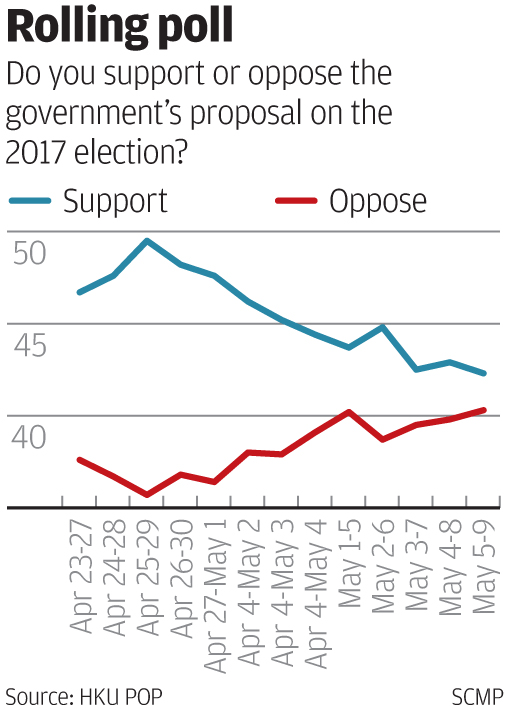
But if you want to compare two
points in time, then the difference is not what you think it stands for because
the samples may overlap. Unfortunately, this is how it is being used right now.
The people who are running this operation is not telling you about this point.
They may not be aware themselves because they are sociologists and not
mathematical statisticians, or else they know it but won't tell you because they
want to make the data more useful than it is.
Survey Question
As for the Wen Wei Po criticism of
the survey question, see #225. Right
now different organizations are asking different questions, such that the
differences could be due to differences in the question as well as differences
in survey methodology. This could be easily resolved by having a single
organization ask the different questions.
The first question is simply the
HKU-POP question: Do you personally support or oppose the Chief Executive
election proposal for 2017?
The other question could be: Would
you prefer to see the Legislative Council pass the proposal so that we can have
one-person-one-vote to elect the Chief Executive in 2017? Or would you prefer to
see the Legislative Council veto the proposal so that the Chief Executive will
continue to be elected by a 1,200-person election committee in 2017?
Political bias
As for the issue of differential
response rates from political camps, here is the detailed information from the
May 6-9 data:
27%: leaning towards pro-democracy
10%: leaning towards pro-establishment
44%: leaning towards middle-of-the-road
16%: No political preference/does not belong to any party
4%: Don't know/hard to say
In the
2010 District Council (second) Functional Constituency Election, the
results were:
Albert Ho (Democratic Party):
228,840 votes (14.4%)
James To (Democratic Party): 316,468 votes (19.9%)
Pamela Peck (unaffiliated): 61,321 votes (3.9%)
Lau Kong Wah (DAB): 199,732 votes (12.5%)
Frederick Fung (ADPL): 262,172 votes (16.5%)
Starry Lee (DAB): 277,143 votes (17.4%)
Chan Yuen-han (FTU): 247,196 (15.5%)
The four pro-establishment
candidates got 3.9% + 12.5% + 17.4% + 15.5% = 49.3% of the votes.
The three pro-democracy candidates
got 14.4% + 19.9% + 16.5% = 50.8% of the votes.
If you believe the survey data in
that 27% are pro-democracy, 10% are pro-establishment and the rest
middle-of-the-road/independent, you will conclude that in 2010, the 63%
middle-of-the-road/independent voters fell 39% pro-establishment and 24%
pro-democracy in 2010.
If this is true, then the
pan-democrats will be routed in the upcoming District Council/Legislative
Council elections because the middle-of-the-road/independent voters will punish
them for losing one-person-one-vote for Chief Executive election.
Response rate
The
May 5-9 data report contained information that stated the response
rate was 69.2%. This is a very high response rate that everybody in the world
will be jealous of. For example, in the United States, response rates are most
likely in the 30%'s.
Upon further scrutiny of the
details, this response rate is falsely inflated. The report said that 35,568
telephone numbers were dialed. These telephone numbers were classified into
three types:
Ineligibles: including fax
numbers; non-working numbers; call-forwarding; non-residential numbers;
technical problems; ineligible respondents.
Unknowns: including busy
signals; no pick-ups; recorded messages; password-protected; language barriers;
no re-contact after an appointment was set up; telephone line problems; other
problems.
Eligibles: Respondent
refused; other family member refused; terminated midway; incomplete interviews;
successful interview.
Among the 1,634 eligibles, 1,130
yielded successful interviews. Therefore the response was 1130 / 1634 = 69.2%.
This calculation is misleading
because a large number of eligibles are hidden in the 16,079 unknowns,
especially the 7,400 unanswered calls and the 5,195 cases in which the
respondents said that they were busy, agreed to take a call-back later but did
not pick up the telephone. If you assume 10% of these people are elibigles, the
response rate would be 1130 / (1634 + 1608) = 34.8%. This is close to
international standards.
P.S. The Polytechnic U
May 5-9 data report lists 5,195 cases as eligibles, which means that
these people passed the screening during the initial contact. In that case, the
response rate would be 1130 / 5195 = 21.5%. This is a lousy response rate that
falls below international standards.
Reference:
American Association for Public Opinion Research - Response Rates: An Overview.
Golden crossover
(post852)
On the June 2-6 poll, the support
and oppose rates were 42.8% and 42.8% respectively. This caused the Civic Party
legislator Ronny Tong Ka-wah to point out that the mathematical odds are
one-out-of-several-million and therefore sure to raise doubts. Tong also said
that there is no joy because it will only harden the positions of the
pan-democrats and the central government and therefore of no help towards a
long-term solution of constitutional reform. Tong urged the poll to stop before
the constitutional reform proposal is voted upon.
(Andrew
Wong's Facebook) An open letter to legislator Ronny Tong Ka-wah.
... as a mathematics teacher, I
want to correct your view.
The three-university polls are
based upon samples of about 1,100 each. If you count only those who support or
oppose, that is about 900 respondents each time. Therefore, the outcome each day
can only be 1:899, 2:898, 3:897 ... up to 899:1. But since the ratios have been
between 35% and 50%, the number of possible results are just more than 100. Each
result has about 1/150 so it is definitely not the 1-out-of-several-million that
you think ...
(Ronny
Tong's Facebook)
Thanks to Andrew for enlightening
me. Mathematics was never my forte. As you said, my response contained
exaggerations! Sorry! I misunderstood! But that was not the point of my response
today. I failed to see how the poll results could help solve the problem. I
cannot control how the media wants to report. I hope the three-university
pollsters accept my apology!
This is just a case of mistakes
piling upon mistakes.
Ronny Tong is wrong, but Andrew
Wong is wrong on many counts.
First of all, samples are subject
to random errors. That is, one random sample of 1,100 from a population of 6.5
million may have results different from another random sample of 1,100 from the
same population. That is why pollsters usually report the margin of error
(=standard error). Suppose the true support rate (p) is 50% and a sample of 900
is taken. The possible outcomes range from 0 to 900 (and not just 1 to 899). The
outcomes are not equal in probability (see
binomial distribution) as some outcomes (e.g. 450 out of 900) are more
likely than others (e.g. 0 out of 900). You cannot just discard the less
probable outcomes (e.g. outside of 35% to 50%) as if they don't exist. And you
cannot say that because they haven't occurred so far, they won't occur in the
future.
Secondly, Wong works on the
binomial model with a binary outcome (either 'support' or 'oppose), and he looks
at the 'support' rate only. But that was not the point of the news report. The
newsworthy part of the story was about both 'support' and 'oppose' rates being
the same number (42.8%). So the problem is not about the probability of the
'support' rate being 42.8%, but the probability of the 'support' rate being
42.8% AND the 'oppose' rate being 42.8%. This is a different calculation.
I am not going to give you the calculation for the probability in a binomial
distribution because of the next point.
Thirdly, the survey question has
three answers: Support, oppose or 'neither' (=half-half/undecided/don't care/don't know/hard to say/no
opinion/refused to answer). The proper model is a
multinomial
distribution instead of the binomial distribution. I am not going to
give the calculation for the probability in a multinomial distribution because
of the next point.
Fourthly, the sample has been
weighted to Hong Kong Census estimates on age, gender and education. That means
each respondent is assigned a case weight based upon the age, gender and
education. The 42.8% support rate is the sum of the case weights of all the
supporters. If the sample size were 1,000, this does not mean that 428 of the
respondents were supporters. It could be more or less. There could be 420
supporters or 431 supporters or whatever. It is just that the sum of the case
weights of the supporters was 428. Therefore, the unweighted multinomial model
is not applicable here.
There are ways of calculating the
probability of the outcome 42.8% support AND 42.8% oppose, such as
resampling. But that requires access to a respondent-level database and
a description of the weighting method/parameters.
And then there is the real problem
...
(Alone
in the Fart) Survival bias. June 11, 2015.
The real problem with Ronny Tong's
view is that he thinks that when the probability of an outcome is one in several
million, then something fishy must be going on when it occurs. This logic error is known as
survival bias. Nobel physicist Richard Feynman once wrote:
You know, the most amazing thing
happened to me tonight. I was coming here, on the way to the lecture, and I came
in through the parking lot. And you won't believe what happened. I saw a car
with the license plate ARW 357. Can you imagine? Of all the millions of license
plates in the state, what was the chance I would see that particular one
tonight? Amazing!
As another example, the latest
MARK 6 lottery ticket has these wining numbers: 7, 12, 16, 17, 20, 25 + 30. To
paraphrase Ronny Tong, "I was somewhat amazed by this outcome. Mathematically
the chances of this combination being picked is less than one out of several
tens of millions." Indeed the 'amazing' MARK 6 lottery outcomes take place
several times a week, as every outcome is just as likely (or unlikely) as any
other outcome but one (and only one) of them will be picked each time.
P.S.
Lottery mathematics: Probability of any combination of 6 numbers from 49
= 1/13,983,816.
Bad Data Usage
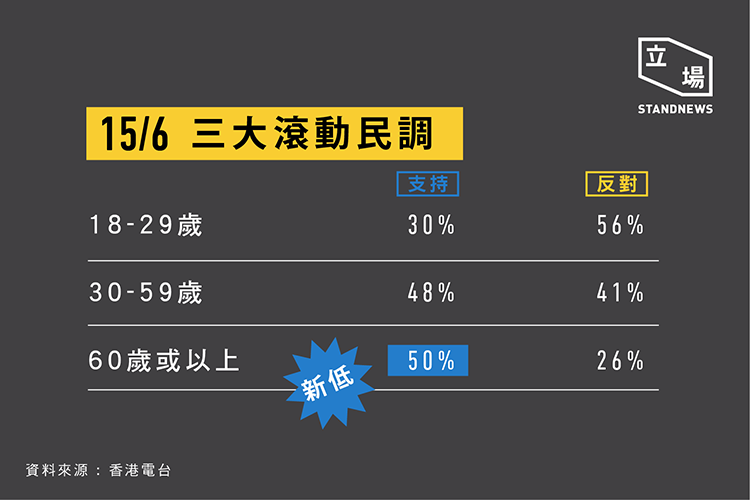
(The
Stand News) June 16, 2015.
Data:
6/15 Three-University Rolling Public Opinion Poll
18-29 years old: 30% support, 56% oppose
30-59 years old: 48% support, 41% oppose
60 years or older: 50% (NEW LOW!) support and 26% oppose
Source: RTHK
Text: Among 18-29 year olds, as
many as 56% oppose and only 30% support the constitutional reform. Among those
60 or older, 50% support the constitutional reform, which is 1% lower than
yesterday and the lowest yet ever since these data began to be released.
I have reviewed the meaning of
comparing two consecutive days (June 10-14 versus June 11-15): this is just
comparing the poll result on June 15 against the poll result on June 10 because
June 11-14 cancels out. Assume that those age 60 or over account for 40% of the
sample, which is about 225 per day. Therefore the situation is something like
this. On June 10, 46 out of 90 persons aged 60 or over supported the
constitutional reform proposal. On June 15, 45 out of another 90 persons aged 60
or over supported the constitutional reform proposal. June 15 has one fewer
supporter than June 10. Furthermore it is the lowest level ever since these data
began to be released.
RTHK is data snooping to find the
worst possible news while disregarding statistical significance. This is freedom
of the press, of course.
Q. Do you think the Legislative
Council should pass the 2017 Chief Executive election bill?
61.3%: Yes (take a huge step forward)
30.6%: No (remain in same spot)
Q. Do you think the Legislative
Council should vote according to the wishes of the majority?
72.0%: Yes
15.5%: No
Q. Will you vote for a political
party that vetoes this bill?
27.4%: Yes
55.2%: No
Q. Will you vote for a legislative
councilor who vetoes this bill?
28.8%: Yes
56.7%: No
Q. Will there be negative
consequences for Hong Kong democracy if this bill is vetoed?
45.9%: Yes
Q. Will there be negative
consequences for Hong Kong overall if this bill is vetoed?
48.1%: Yes
(Wen
Wei Po) May 5, 2015.
The Hong Kong Civil Action
interviewed by pone 1,493 persons at a response rate of 36%. Among the
respondents, 25.4% said that they are in the opposition, 28.4% said that they
support the establishment and 46.3% are middle-of-the-roaders.
Q. How much do you know about the
government's announced plans for the 2017 Chief Executive election?
41.0%: Very knowledgeable
45.5%: Somewhat knowledgeable
Q. Do you support the 2017 Chief
Executive election proposal?
46.2%: Yes
39.3%: No
Q. Do you think that the
Legislative Council should pass 2017 Chief Executive election bill?
55.2%: Yes
36.4%: No
Q. Do you agree with the statement
"Pocket it now = Pocket it forever"?
42.7%: Agree
47.0%: Disagree
Q. Do you think that the central
government will yield to the threat of veto by the pan-democrats?
7.2%: The central government will yield
64.4%: The central government will not yield
Q. If the opposition vetoes the
2017 Chief Executive election bill so that citizens won't have the chance of
electing the Chief Executive, will this cause great harm to Hong Kong politics,
economy, society, etc.
49.2%: Agree
19.8%: Half-half
33.4%: Disagree
Q. If the Legislative Council
fails to pass the 2017 Chief Executive election bill, who responsibility will it
be?
45.0%: The pan-democratic legislators
32.1%: The pro-establishment legislators
Q. For 2016 the Legislative
Council elections, will political positions and attitudes be affecting election
outcomes?
66.2%: A lot of influence
18.8%: No influence
Q. If the 2017 Chief Executive
election bill fails to pass, will the central government re-start the electoral
reform process?
28.6%: Yes
(Oriental
Daily) May 5, 2015.
A number of public opinion polls
have been released after the government made public its 2017 Chief Executive
election proposal. Most of them showed that the support rate for the bill is
around 50% and the opposition rate at over 30%. Some pan-democrats interpret the
results as being evidence of solid support for opposing "pocketing it first."
However, government insiders
explained that these many of these public opinions were only asking citizens
whether they supported the 2017 Chief Executive election proposal. When other
polling organizations ask citizens about whether the Legislative Council should
pass the proposal, the support levels rise up close to 60%. As the time for the
vote approaches, those support levels will surely rise to go past 60%.
By coincidence, the
pro-establishment Hong Kong Civic Action just announced its public opinion
poll results yesterday. When asked whether they themselves support the current
proposal, 46.2% said yes. But when asked whether the Legislative Council should
pass the electoral reform bill, 55% said yes. This is consistent with the
aforementioned reading by the government insiders.
Relevant link:
Why Do Poll Numbers Differ By So Much?
(Oriental
Daily) May 3, 2015.
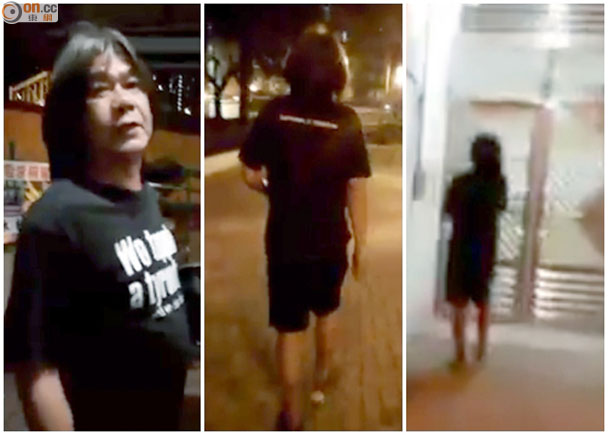
There has always been questions
about League of Social Democrats legislator "Long Hair" Leung Kwok-hung earning
$90,770 per month from the Legislative Council while still living in public
housing (which were intended to serve low-income people). Someone just posted a video
in which a woman follows Leung home, criticizing him for taking up public
housing space, accepting "dark money" and "being a canine thug." Leung replied
to say, "Housewife, get lost!"
Video: (YouTube)
American Long-haired Dog becomes Rat-in-the-street
0:04 (Woman) I am now following
that damned piece of trash. I am following the canine thug. Hey, canine thug!
Chinese traitor!
0:12 (Leung) Get lost, housewife!
0:13 (Woman) Yes, get lost! You live in public housing. A few hundred thousand.
You make a few hundred thousand. You also accept "dark money."
0:20 (Leung) What several hundred thousand?
0:21 (Woman) You also accept "dark money." You are hogging a public housing
unit. You also sleep in the streets. You talk big. At the Legislative Council,
you talk big.
0:33 (Leung) You get lost!
0:34 (Woman) You eat banana!
0:35 (Leung) You should complain to the Housing Department. The Housing
Department will investigate.
0:37 (Woman) You eat banana!
0:39 (Leung) Of course, you are used to eating it.
0:40 (Woman) Is the Housing Department your fraternity brother? You make so much
money and yet they let you live there. Other people aren't allowed to live there
just because their income is slightly over the limit. They can't get in.
0:48 (Leung) I think you are going to eat banana.
0:49 (Woman) They can't get in. You make more than one hundred thousand, two
hundred thousand a month, and still you live in public housing. What do you get
preferential treatment?
0:55 (Leung) The Housing Department will investigate.
0:56 (Woman) Yes. That's why I am asking.
0:57 (Leung) All you have to do is file a report.
0:58 (Woman) I want to ask you. I want to ask you.
0:59 (Leung) That is why. You are used to eating banana, housewife!
1:02 (Woman) I ... I ... I like to eat yellow bananas most of all. I like to eat
yellow bananas most of all.
1:10 (Leung) You don't have the money to eat bananas.
1:10 (Woman) Is that so? You eat shit!
1:13 (Leung0 You eat shit!
1:14 (Woman) You eat shit, you!
1:16 (Leung) I look at you and it is obvious that you eat bananas!
1:17 (Woman) Take a look at your damned face. You are going get a haircut in
jail soon.
1:22 (Leung) You take a look at yourself ...
1:23 (Woman) Hey, it's time to go to jail and get a haircut.
1:25 (Leung) Don't worry about me. If I go to jail ...
1:26 (Woman) Yes, you get paid to go to jail. You get paid to go to jail.
1:34 (Leung) You are not even have money to eat bananas, housewife!
1:37 (Woman) Why do I have to eat bananas? I eat steak every day.
1:44 (Leung) You throw up when you look at your own face.
1:45 (Woman) That would be you.
1:46 (Leung) You go and eat bananas!
1:47 (Woman) That would be you. Your shitty-man look. You are ruining Hong
Kong's cityscape. Go quickly, quickly, to the incinerator and make yourself
vanish.
Internet comments:
- The
Housing Authority set limits on maximum income and net assets. The
maximum monthly income is $10,100 for a one-person family. Leung Kwok-hung makes
$90,770 per month. This is why people have questions about Leung's situation. It
is up to Leung to explain. He tells you that you don't have to take his word for
it, but you should check with the Housing Authority yourself. If you do ask the Housing Authority, they will say that
they do not discuss individual cases due to privacy laws.
- As for the net asset limit, it
is $236,000 for one-person families. (EJinsight)
Leung Kwok-hung received HK$500,000 from Jimmy Lai directed to him personally.
Leung claimed that he accepted the money on behalf of League of Social Democrats
for party expenses, not for personal use. But if it's used to pay his bar bills,
then it was self-enrichment.
- How does Leung Kwok-hung get to
keep his public housing unit? According to the
Legislative Council, members make $90,770 per month in salary. In
addition, for each year, each member is allocated $2,327,330 for office budget
and $198,890 for entertainment/traveling. It is said that Leung donates his
money to a foundation, so that his net income is under the limit for public
housing purposes. If he needs to spend money (such as paying for bar bills), it
comes from the Legco or foundation expense accounts. He is the only person
authorized to spend the foundation's money. Everything is legal.
- Everything is legal? What if the
whole world goes out and does the same to set up foundations. Then nobody will
ever exceed the maximum levels for income and net assets.
- Just because it is legal does
not make it right. By transferring his salary to a foundation, Leung is
effectively using government resources to fund his politicking. Why should
taxpayers subsidize him?
- Leung Kwok-hung's party expenses
for entertainment:
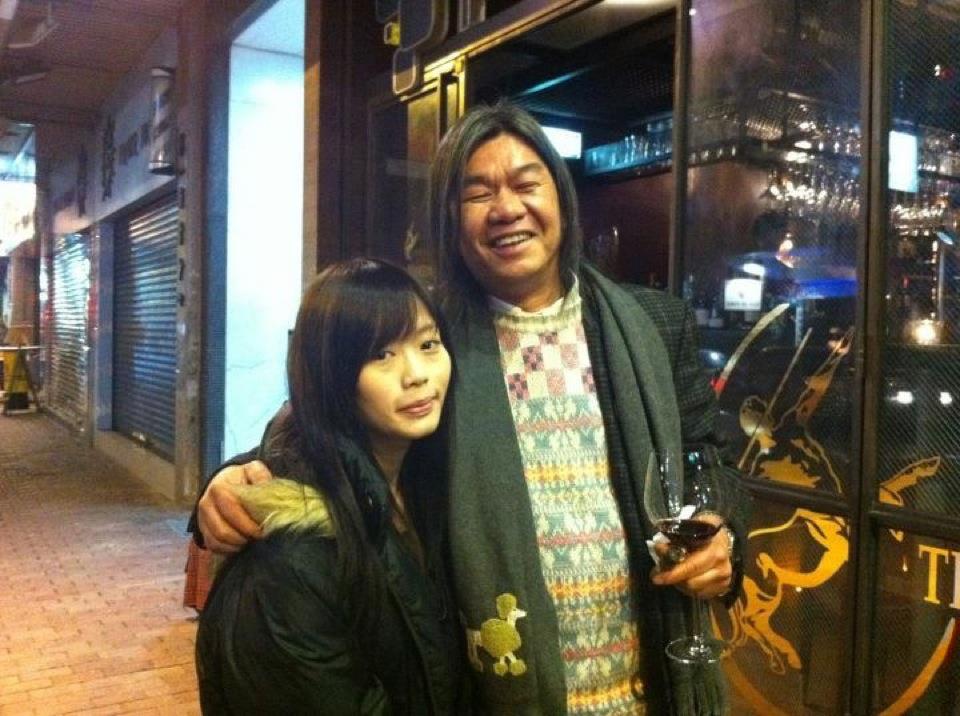
- Leung Kwok-hung's party expenses
for professional equipment:
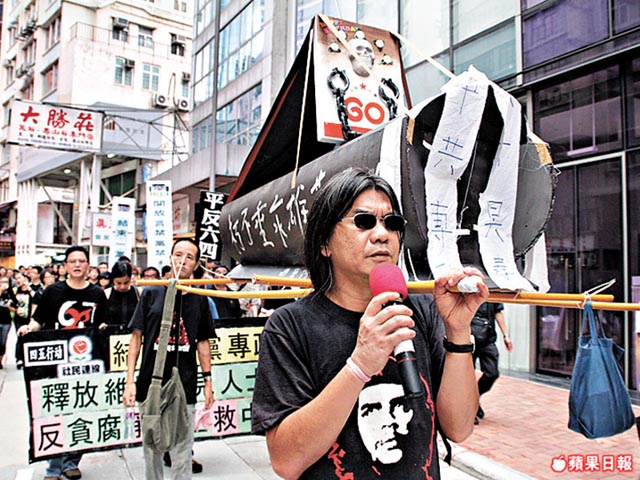
- If this is a legal loophole,
then why don't the Senior Counsels/Senior Barristers/Legislative Councilors of the Civic Party
attack the government for allowing this loophole to persist? Who is being
derelict in duty here?
- Leung Kwok-hung has been living
in public housing for decades already. If you are so angry with him, then why
don't you denounce him to the authorities? Scolding and harassing him in public
won't accomplish anything.
- What irony! Let me repeat this: "CY Leung has been Chief Executive for years.
If you are so angry with him, why don't you go through the process to remove
him? Scolding and harassing him and other ministers in public won't accomplish
anything." But somehow you won't buy this, right? Tou are only
interested in venting anger and you are not interested in solving any problems
(because that would be too hard).
- Why are there not enough public
housing to meet demand? It is because people like Leung Kwok-hung are hogging
the space even if they don't need it.
- A reporter friend of mine
assures me that Leung Kwok-hung donated two-thirds of his salary to grassroots
people. Therefore I trust him.
- I rolled over laughing when I fucking saw the above comment!
- The reporter must be from Apple Daily. If you believe Apple Daily ten percent,
both your eyes will go blind.
- This woman is heaping insults
and borderline obscenities (e.g. "get lost") in public at another citizens. She
has violated a number of laws already. She should be identified, arrested and
prosecuted.
- If this woman is prosecuted, what should happen with the band singing
Fuck The Police at Lingnan University?
- The behavior of the unidentified
is being characterized as 潑婦罵街: "An ill-tempered shrew scolding in the street."
If that qualifies as criminal behavior, then how about Leung Kwok-hung throwing a
banana at the Legislative Council (see
YouTube)?
- If this woman is said to be
harassing Leung Kwok-hung, then what can you say about the behavior of these
reporters with respect to tycoon Joseph Lau (see
YouTube)? Or how
about a reporter sticking the microphone into Lau's face (see
YouTube)?
- (Sing
Tao) December 11, 2015. At the debate competition yesterday, a student
asked about certain wealthy individuals hogging public housing units. Chief
Executive CY Leung said: "We need to increase public housing rents for wealthy
individuals. Or they can yield their units because they can surely take care of
themselves. Their units are in demand by many citizens who are currently living
in squalid conditions. You've been a Legislative Councilor for many years
already, so you must have some savings. As a Legislative Councilor, you are a
wealthy man and you don't need to live in public housing." In response, Leung
Kwok-hung said that many people think that Legislative Councilors are wealthy
people who have to live in luxury apartments, but he is not. He said that CY
Leung's thinking is weird. "He can say whatever he wants," because the Housing
Authority has investigated his case and found that his assets are within the
limits.
(Oriental
Daily with video) 12:50 May 3, 2015.
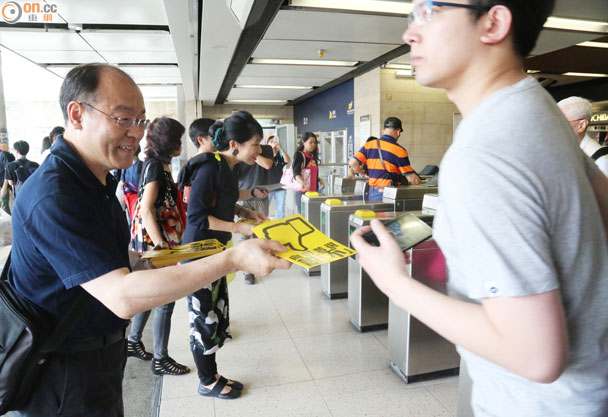
A group of pan-democratic
legislators set out today to promote "Say No to fake universal suffrage" in a
motorcade. The group set off from Tai Kok Tsui and visited street booths in Mong
Kok, Sham Shui Po and Tsuen Wan. At the Mong Kok East train station, they passed
out pamphlets to explain why the "pocket it first" solution is bad, and they
used megaphones to promote their ideas. But very few people took the pamphlets.
Even those who took the pamphlets just left quickly without further exchange.
There were about 20 to 30
uniformed police officers and several plainclothes police officers maintaining
order at the scene.
(Oriental
Daily) 18:32 May 3, 2015. (Oriental
Daily) 19:00 May 3, 2015. (Oriental
Daily) May 4, 2015.
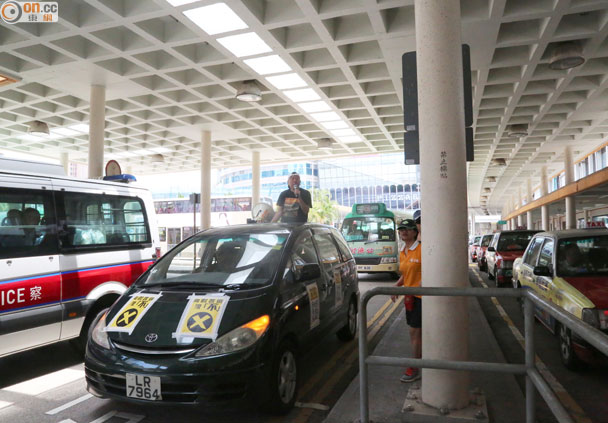
The motorcade arrived at Mong Kok
East MTR station at around 11am. Labour
Party legislator Lee Cheuk-yan was filmed standing on the car seat and sticking
half his body out of he sunroof while the car was still in motion. Since he did not wear his seatbelt, he was
clearly violating a well-known traffic law on wearing seat belts at all time. In addition, Lee's vehicle
stopped for about 20 seconds in a double-yellow-line zone where stopping is prohibited 24
hours a day. So this is another violation of the law. Lee was also using a
megaphone, for which it is not certain whether he had the appropriate permit for
public use.
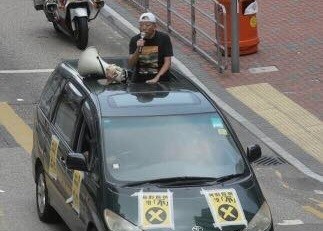
On Facebook, Lee Cheuk-yan
responded that they received a no-objection letter from the police for this
motorcade which moved along at a slow pace. He saw no reason why he couldn't
stand and speak through the sun roof. However, he said that he was prepared to
be ticketed because he has no special privileges. Lee posted a photo of himself
in the same unlawful position while the car was still on the road.
The relevant law is
Road Traffic (Safety Equipment) Regulations 370F regulation 7B:
... no person shall ride as a
passenger in a rear seat of a private car, taxi or public light bus on any road
unless he is securely fastened to his seat by means of a seat belt, if any,
provided for this seat.
... no person shall drive a
private car on any road when there is a passenger in a rear seat who is not
securely fastened to his seat by means of a seat belt, if any, provided for his
seat.
... any person who contravenes the
regulation commits an offence and is liable to a fine of $5000 and to
imprisonment for 3 months.
(Oriental
Daily) 15:12 May 3, 2015.
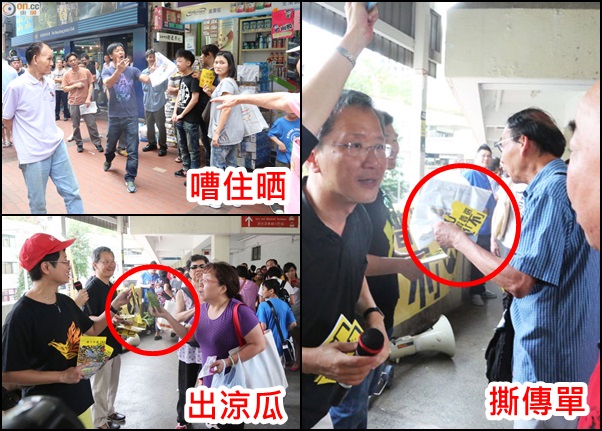
At Sham Shui Po, the pan-democrats
got into many verbal arguments with passersby. When they first arrived, the
street booth was close to a Jockey Club betting branch office and the punters
inside were unhappy about the commotion created by the pan-democrats. So someone
came outside, cursed them out and got into an argument with a pan-democratic
supporter.
When the group reached Tsuen Wan,
a man took a pamphlet from Democratic Party legislator Sin Chung-kai, ripped it
up immediately and wanted to give it back to Sin. Civic Party legislator Kwok
Ka-ki quickly took the torn pamphlet, stuffed it inside his trouser pocket and
pretended nothing had happened. Then another men came and told them that they
are obstructing other people. A pan-democratic volunteer asked the man: "Are you
a DAB member?" The man left without responding.
Then a woman holding a bitter
melon came by and told the group: "If we have to count on you people for
democracy, we're dead!" (note: the word for 'melon' sounds the same as 'dead').
She also criticized the pan-democrats for obstructing universal suffrage.
Video transcription:
0:00 (Woman waving bitter melon)
You people die! Die quickly!
0:07 (Volunteer) Did you recognize the right people?
0:09 (Woman) What? If we depend on you people for democracy, we're dead! I was
food shopping. I happened to pass by. If we depend on you people, we're dead! If
we depend on you for democracy, we won't have a future.
0:24 (A man rips up a pamphlet and
gives it back) I give this back to you.
0:28 (An angry man in front of the
Jockey Club betting branch holding a horse-racing sheet in this left hand and a
cigarette in his right hand)
Videos:
Internet comments:
- By this time, the two sides are
simply going through the motions. Everybody knows how it is going to end, but
you still have to go through the motions as if you are still striving hard. With
the population split 50%-60% for and 30%-40% against for a long while, you are
not going to change many minds by reaching out to the local communities. You
will only provide photo opportunities for some of your opponents to stage a show
to vent their anger. This is true for both sides.
- That woman holding the bitter
melon has a good sense of humor. Civic Party legislator Alan Leong Ka-kit goes
by the nickname of "Bitter Melon Kit" because "bitter melon" sounds close to "Leong
Ka" in Cantonese.
- Lee Cheuk-yan is 58-years-old, so
he can't reasonably claim that he is unaware of the seatbelt law. The maximum
fine is $5000, which is peanuts compared to his month legislator salary of
$90,770 plus reimbursements to the tune of several million dollars per year. This reminds
me of the case of the rich man who parks anywhere he wants because the $320
parking violation fine is just like a parking fee to him. The maximum jail time
is 3 months, and that may cause a legislator to lose his job under
Basic Law article 79 ("When he or she is convicted and sentenced to
imprisonment for one month or more for a criminal offence committed within or
outside the Region and is relieved of his or her duties by a motion passed by
two-thirds of the members of the Legislative Council present"). However, the
pan-democrats hold 27 out of 70 seats and can make sure that no such resolution
is passed, because an important freedom fighter should not be ousted by
political persecution over a trivial matter such as violating the seatbelt law,
which applies only to little people.
- Lee Cheuk-yan broke all manners
of traffic law. This confirms the pan-democrats' view that when it comes to
matters of great right and wrong, the law comes second.
- Today the pan-democrats asked
each of their critics: "Are you a DAB member?" as if the only people who might
object to them must be a DAB member. The DAB only has 10,000 or so members out
of a population of 7.3 million. They
can't be everywhere. These pan-democrats still don't understand why Occupy
Central has done to their brand. Look at how Democratic Party chairwoman Emily
Lau dressed in all-yellow today:
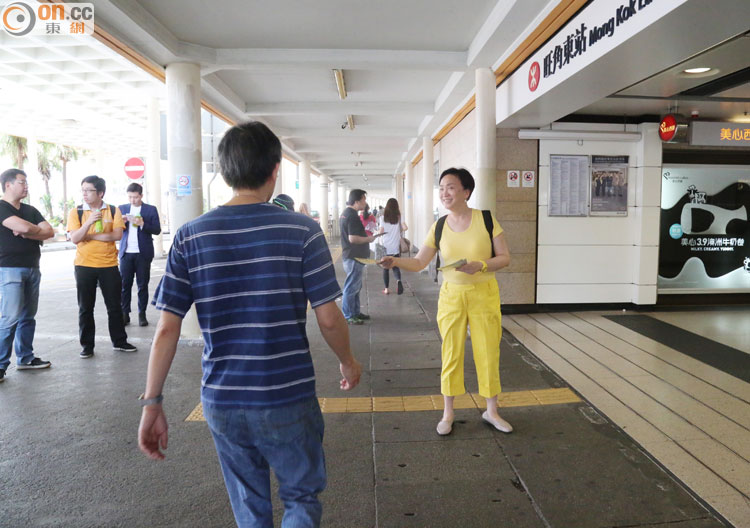
- Why can't you count on these
people for democracy? This is summarized by a listing of those pan-democrats who
have received political donations from media tycoon Jimmy Lai to the tune of $50
million totals.
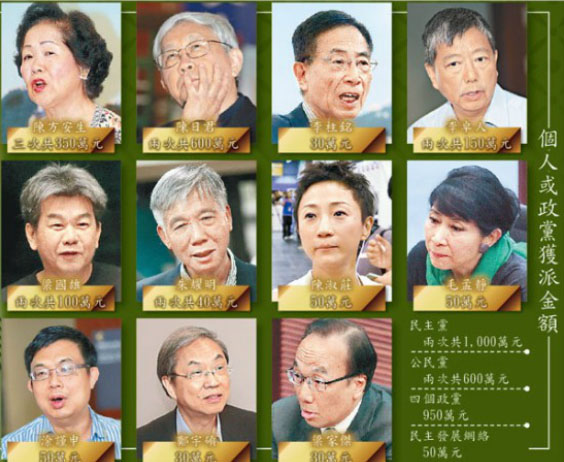
- Oh, Claudia! This video
https://www.youtube.com/watch?v=FUewYalCL8M is such a gem. Go see it
yourself -- you can even turn the sound off because you can basically guess that
this is just inane stuff. The point is to watch Claudia Mo Man-ching go through
her contortions --- she winces, she makes faces, she pretends to wipe saliva off
her face, she laughs, she pretends not to see the speaking person right in front
of her, etc. And this is the same person who criticize government officials for
not reaching out to real citizens. Her problem is that while she wants to reach
out to citizens, she prefers them to be compliant supporters and not noisy
dissidents.
(The
Sun) May 2, 2015.
Under the double blow of the anti-mainland
visitor actions and the devaluation of the yen/won, this Labor Day holiday is no
longer the Golden Week of yore. Instead, mainland tourists are flocking to South
Korea, Japan and Thailand. In past years, more people enter than leave Hong
Kong. Yesterday, the Immigration Department said that 299,000 persons entering
and 310,000 leaving as of 5pm.
In Mong Kok, the dispensaries and jewelry
stores along Sai Yeung Choi Street South and Nathan Road were doing poorly. Only
the cosmetics shops were still doing well. According to Mr. Lam who operates a
dispensary on Sai Yeung Choi Street South, they used to order 20 cartons of
infant milk formula a week, but now they sell half as much. So Mr. Lam is now
branching into selling cosmetic products.
According to Mr. Hui who manages a jewerlry
store on Nathan Road, the current business conditions are worse than that of the
2003 SARS period.
Meanwhile in Causeway Bay, the situation was
just as grim. According to Mr. Tang who operates a dispensary on Percival
Street, he used to make $60,000 a day selling infant milk formulae and
ointments. Today, he just managed several thousand dollars. His total business
volume is 30% compared to the same period last year. Although his landlord has
reduced rent from $800,000 down to $600,000, he does not know if he can afford
it.
Mainlanders are now heading towards Japan and
South Korea in large numbers. In March this year, Japan issued tourist visas to
268,000 Chinese, a 50% increase over the same month last year. Meanwhile,
mainland visitors to South Korea grew by 22% to reach a record high for the
month of March. In addition, the devaluation of the euro has also attracted
large numbers of high-spending mainlanders to go to Europe.
Internet comments:
- The organizers of the anti-parallel trader
demonstrations are claiming credit for a more serene Hong Kong that suits their
own tastes. They are right. When you go about beating up an old man playing
music in a local park, the whole world pays attention. Nobody in the world would
want to come to the World Capital of Kicking Suitcases, and be cursed out and
beaten up.
- The photo seen around the world: Valiant warriors in action.
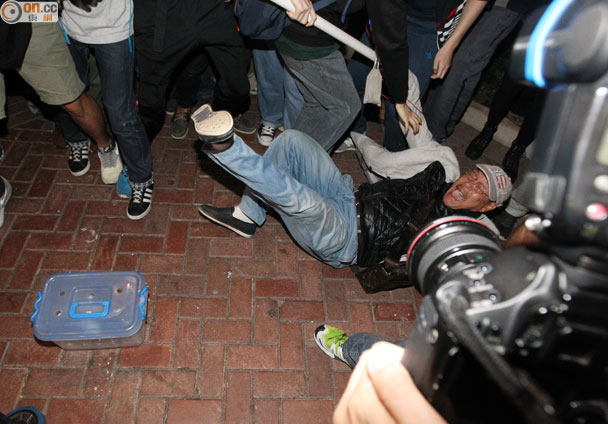
- They never set out to beat up an old man. In the manner of
Ting Hai, they say that they were forced
to beat up the old man for his own good.
- There are too many dispensaries in Hong Kong.
Hongkongers aren't that sick, are they? See Bruce Lee's
Fist of
Fury in which he fights to decide whether the Chinese or the Japanese
are the Sick Men of East Asia.
- The dispensaries and jewelry shops should all
go out of business, for we don't need the stinking money of the mainland
locusts. The displaced workers can go and grow organic vegetables in North East
New Territories.
- You say that the dispensaries and jewelry
shops are making unseemly/seedy profits off their trades, and therefore they
deserve to go out of business. I just went out to purchase a can of hair spray
gel for $30 from a Mong Kok dispensary. The same product is selling for $38 at
Mannings and Watsons. Who is making unseemly/seedy profits? Why don't you
come up with some action plan to put Mannings and Watsons out of business? Why
don't you start your own mom-and-pop non-profit dispensary to serve the people?
- What exactly does Hong Kong make that is so
unique that tourists will flock from all over the world to buy?
Infant milk powder? Hong Kong does not have cow farms. Hong Kong imports infant
milk powder from Australia, New Zealand, the Netherlands, Japan, etc. Americans
don't come to Hong Kong to buy infant milk formula.
Diapers? Hong Kong does not have any diaper-manufacturing factories. Hong Kong
imports its diapers from the United States, Japan, etc.
Ricqles peppermint cure? That is a product of France. Hong Kong imports
it and sells a lot to mainlanders. Germans don't come to Hong Kong to buy
Ricqles.
Just wait a couple of years and the producers will ramp up to serve the mainland
market directly and bypass Hong Kong as the intermediary. This is simply more
economically efficient for everybody.
- Do you really go to dispensaries to buy
medicine? I usually go there to buy oatmeal, shampoo, hand wash, body wash,
razors, shaving cream, laundry detergent, plastic tablecloth, Horlicks malt milk
drink, coffee, cotton swabs, toilet paper, tissue paper, candy, potato chips, ...
- Well, the argument is that Mong Kok and
Causeway Bay are overcrowded by mainland tourists shopping at dispensaries and
jewelry stores. Therefore, beating a few of them up would discourage them from
coming and everything seems to be working according to plan.
- The next step is to move on to other
overcrowded locations that overspecialize in a single product line -- such as
Goldfish Street, Dried Seafood Street, Tonic Food Street, Bird Street, Flower
Market, Athletic Shoes Street, Golden Arcade (computer-related products),
Computer City, Sin Tat Plaza (for mobile phones), Women's Street for tourist
trinkets, etc. The demonstrators can go down and beat up a few random patrons,
and then nobody will go there. After we accomplish this, the next step is to
export the method to Macau and teach their people how to eradicate the casinos
which are drawing too many gamblers who crowd the streets and take up all the
taxis ...
- I just went out to Sham Shui Po. The streets were filled with people. I could
barely inch my way through. So we need to eliminate the shopping arcades, food
markets, restaurants and stalls in order to have peace and tranquility.
- There is a Chinese term: 損人利己 t. Google
translates it as "selfish." Literally, it means "hurting others while benefiting
oneself." The anti-parallel trader demonstrators do not like mainlanders
(whether they are parallel traders, tourists, business people or immigrants), so
they took action to reduce the number of mainland visitors. They are now happily
benefiting. Meanwhile their actions have hurt the livelihoods of others (and
their families). So there you have it. Of course, in the manner of
Ting Hai, they will delude themselves
into thinking that this is for the good of everybody, and if you demur, you are
just an ingrate.
- The selfish person thinks: "Well, I don't
work in the tourism and retail sectors, and nobody else in my family does. So I
don't care if those people suffer." Have you heard of the
multiplier effect? When the tourism and retail sectors are booming, more
workers are hired and salaries/bonuses are raised. These workers spend more
money, which becomes someone else's income, and so on.
Consider the case of an art movie house. When the economy is booming and people
have lots of money in their wallets, they come out and watch art films. When the
economy is in recession, many people lose their jobs or have their incomes
reduced, they cut back on discretionary spending and stay home. So you shouldn't
think that a shrinkage of the tourism and retail sectors won't affect you.
- What are you talking about? I was at Metro
City Plaza (Tseung Kwun O) yesterday. It was packed full of people. Today I went
to Citistore (Yuen Long). It was the same thing. I waited 20 minutes on line to
make a purchase.
- Here is the irony. The anti-parallel trader
demonstrators have managed to chase away tourists (both mainland and elsewhere),
but kept the parallel traders who have to make a living and do not worry
themselves about these pre-announced Sunday-only single-location demonstrators.
- The May 1st vacation is only three days long
this year on the mainland, compared to the Golden Week (seven days) in past
years. It should be no surprise that fewer mainlanders are traveling.
(Apple
Daily) May 2, 2015.
Ma On Shan resident Henry has been paying
attention to developments in his neighborhood. "There have been a lot more
dispensaries and jewelry stores opening. I don't want this to become another Sha
Tin New Town Plaza." Recently, Henry has observed many mainlanders coming out to Ma On
Shan. They stay at the newly opened hotel as well as the YMCA Wu Kai Sha Youth
Village. Many residents are irritated, including the sight of almost one hundred
mainlanders wading on the beach.
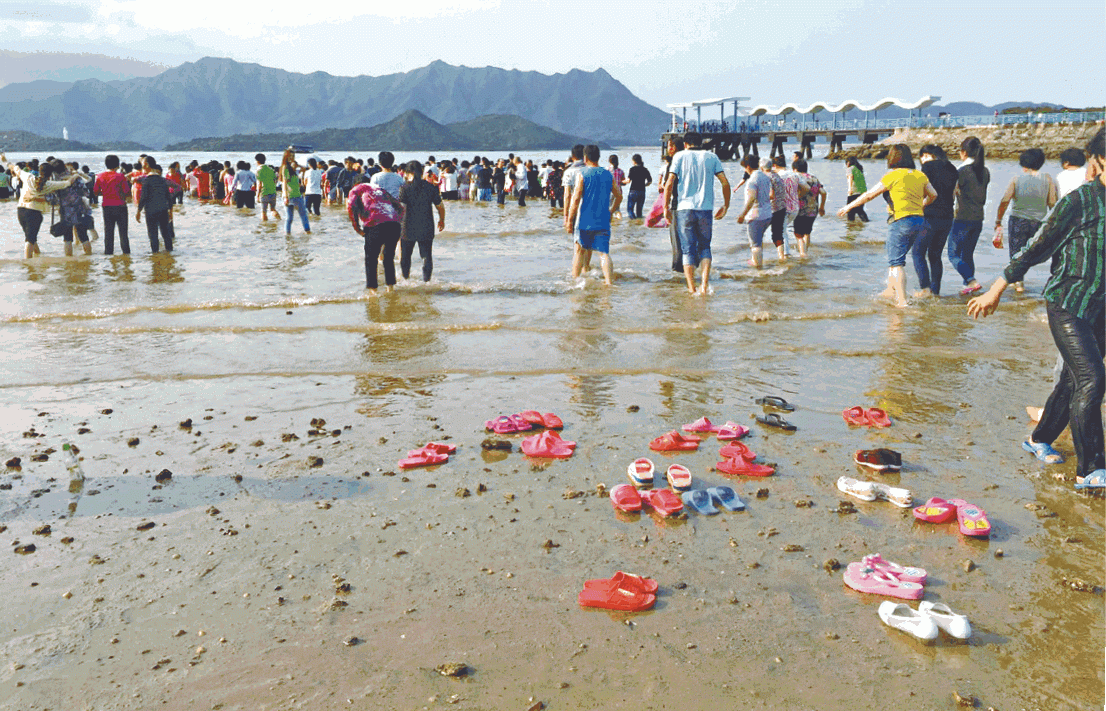
According to Facebook group Friends of Ma On
Shan member Cathy, tourists checking into the YMCA Youth Village will increase
pressure on local residents.
Internet comments:
- I completely sympathize with Cathy. The YMCA
Youth Village should be open only to permanent Hong Kong residents at low rates
(like $5 per night) with free food, shower and karaoke provided. Of course, the place
will be packed. But since these are civilized Hongkongers, Cathy will agree that
it's alright.
- If the YMCA Youth Village is open only to permanent Hong Kong residents, some
Hongkongers will give 'likes' on Facebook but they won't ever visit there. The
place won't be financially viable. Therefore, we must get to the root of the
problem -- the YMCA Youth Village will be open to all except mainlanders (and
dogs). That's
it.
- YMCA Youth Village will have restrictions on who can come? I thought that they
are the Young Men's Christian Association, and Christianity is universal
brotherhood. Or does Hong Kong have a different brand of Christianity?
- In case you need things explained to you ...
When poor-quality mainlanders go on shopping
sprees in Japan, that is known as irritating the local populace.
When high-quality Hongkongers go on shopping sprees in Japan, that is known as
helping the local economy.
When poor quality mainlanders go to Pak Nai to watch the sunset, that is known
as irritating the local populace.
When high-quality Hongkongers go to Pai Nai to watch the sunset, that is known
as enjoying nature.
When poor-quality mainlanders go to Wu Kai Sha to enjoy the beach, that is known
as irritating the local populace.
When high-quality Hongkongers go to Wu Kai Sha to enjoy the beach, that is known
as enjoying nature.
- There are many mainlanders in those private
apartment complexes, mainly faculty members of the Chinese University of Hong
Kong and the University of Science and Technology. There can't be that many
parallel traders there, because the travel trip is too long and therefore
cost-ineffective (Lowu to Sheung Shui to Chinese University of Hong Kong by
train, then to Ma On Shan by bus; or Lowu to Sheung Shui to Tai Wai by train,
switch to Ma On Shan line).
- As the Hong Kong City-State valiant warriors
say, Ma On Shan residents must save themselves through their own efforts. If
they kick a few suitcases, curse out everybody, make small children cry and beat up some old men, the
message will go out and the visitors will stop coming.
- Bonus:
YouTube:
Village People singing YMCA
(Sina.com.hk)
April 23, 2015.
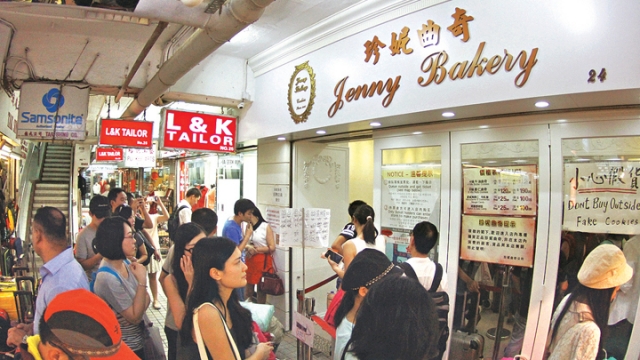
Jenny Bakery is a favorite with mainland
tourists. Due to the entry restrictions applied to Shenzhen residents, business
has suffered. Jenny Bakery says that it wants to re-discover its local customer
base, but Internet users are skeptical and say that Jenny Bakery deserves to
die. According to Next Weekly, Jenny Bakery founder has said that their regular
customers have reduced purchases by 50% ever since the anti-parallel traders
demonstrators began.
Internet comments:
- They treated Hongkongers like dirt before,
and now they come kowtowing.
- They can go back and open stores in mainland China instead. I won't go there
for sure. I won't die just because I can't eat their cookies.
- I went there last year. The mainlanders were buying multiple boxes at a time.
I wanted one box and they gave me a dirty look as if they didn't want my
transaction.
- I have tasted their cookies before. The butter flavor was too strong. Nothing
so distinguished
that would make me eat it again.
- Maybe it is time for you to go back because there are no lines anymore
(according to the news report). You can check if they still give dirty looks.
- They can sell chick biscuits instead, because
that is quintessentially Hong Kong. But there is no way that they will ever have
the same sales volume again. Hongkongers are great at giving verbal support to
businesses, but they don't actually come out and put the money where their
mouths are (see, for example,
HKTV). When the shop
goes out of business, they rush out immediately to take photos for the sake of
collective memory.
And the the pan-democrat legislators will come out and complain that the
government does not provide enough support to small- and medium-sized
enterprises.
- High-quality Hongkongers only eat Kjeldsens
Danish cookies.
- At Chung King Mansion, Jenny Bakery has a
secret competitor upstairs. These other people send out workers to distribute
flyers to mainlanders on the street to entice them to go upstairs and buy their
imitation bear cookies. This is the type of sneaky action that Hongkongers are really
good at too.
- Hongkongers don't like to wait on line. When
they have to wait on line, they think the shop is disrespecting them. They
expect to be served immediately because they are high-quality high-educated and
high-income. Remember
Tiffany Chin?
- Here is the life cycle of a Hong Kong
boutique:
(1) You start your business. Nobody knows you and you are losing money.
(2) You persist and you build up a reputation. You get a lot of 'likes' on Facebook.
But you are still losing money.
(3) You become famous in Hong Kong. The mainland visitors heard about you and
flock over. Now you are making big money.
(4) Hongkongers become incensed at the mainland attention and boycott you. You
are making just as much.
(5) The wave of raves is over, and you begin to lose money.
(6) You go out of business, and Hongkongers place you into their collective
memories.
(7) What to do next? You go back to (1) to start a new business. You are a
modern Hongkonger
Sisyphus.
- Don't be silly. This story is sourced to Next
Weekly, which employs fiction writers and not reporters. I just went by Jenny
Bakery in Sheung Wan. There were twenty people in line. How many businesses wish
they could have so many customers?
- (BBC)
"The Heritage Foundation has ranked Hong Kong as the world's freest economy for
the past 18 years."
But today, instead of letting the free market decide the fates of stores such as
Jenny Bakery, some media are injecting politics to start mass movements which
behave like the
Boxers.
(The
Sun) May 2, 2015.
Internet users proclaimed that they would be
holding a May 1st 18-district shopping tour against parallel traders. More than
200 persons replied that they will participate. Yesterday our reporter went out
to Trend Plaza and did not see many people. There were more than a dozen police
offices on alert, but just a few Internet user-types strolling around. At Sha
Tin New Town Plaza, the situation was similar. No demonstrators, and the mall
traffic was less than the same time last year.
In Mong Kok, the Internet users said that they
would watch a move there. At around 6pm, several demonstrators gathered to chant
"I want genuine universal suffrage." Two of them waved the British colonial
dragon-lion flag for Hong Kong independence.
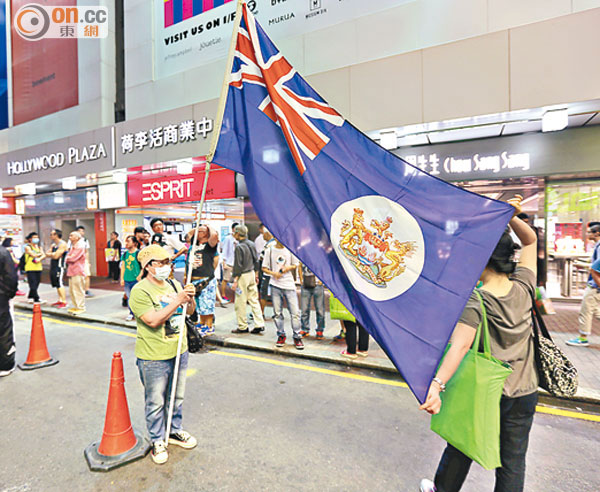
However, the organizers of the May 1st
18-district shopping tour announced victory anyway. They said that they achieved
the goals of publicity. In fact, they were actually counter-demonstrating
against the Federation of Trade Unions on Hong Kong Island.
(Oriental
Daily) May 1, 2015.
The Federation of Trade Unions marched from
Southorn Playground to Tamar Park to demand legislation for standard work hours,
to stipulate the legally mandated public holidays, to reform the Mandatory
Provident Fund scheme, etc. The Federation also arranged for Chief Secretary
Carrie Lam to make an appeal for the Chief Executive electoral reform.
(Apple
Daily) A dozen or so social activists gathered outside Southorn
Playground and protested against the Federation of Trade Unions: "FTU is selling
out the workers, they are stalling the Universal Retirement Protection." and
"they are getting rid of the right to collective bargaining." According to
one social activist, the Federation of Trade Unions refused to support those
legislators who are filibustering the government budget bill to force Universal
Retirement Protection. Instead, FTU blindly support "white elephant projects"
such as the High Speed Rail and the Northeast New Territories development
project.
(SCMP)
Chief Secretary Carrie Lam Cheng Yuet-ngor was accused yesterday of hijacking a
rally organised by the city's biggest labour union to promote the government's
political reform package. Chinese University political scientist Dr Ma Ngok said
Lam's move showed how desperate the government was to win public support. Lam
made the surprise appearance in the rally at Tamar Park after a Labour Day march
by the Beijing-loyalist Federation of Trade Unions. The rally was originally
scheduled to end after a police officer represented the government in receiving
the federation's petition on labour rights. But the federation's president, Lam
Shuk-yee, raised eyebrows when he announced that a government official was
coming to "listen to the workers' political demands". The unionist and about 20
FTU lawmakers and leaders then braved the rain and chanted slogans for about 10
minutes calling for universal suffrage in 2017, before Carrie Lam arrived in her
car and addressed the rally.
Referring to the government's reform
package unveiled on April 22, Lam said: "Do not listen to those who said
that the proposal is fake universal suffrage, because it is a real and
competitive one … It will give five million eligible voters a vote, and 'one
man, one vote' means the chief executive and his cabinet will be closer to
public opinion." The minister refused to say whether she initiated her
publicity blitz or whether she was invited, but Lam Shuk-yee said the FTU
had asked for an official to attend because some members hoped that the
rally would not focus only on labour rights. FTU chairman Stanley Ng
Chau-pei said Lam was just showing support for workers and responding to
their demands.
(Oriental
Daily) May 1, 2015.
The Hong Kong Confederation of Trade Unions
marched from Victoria Park to Government Headquarters to demand legislation for
standard work hours, to oppose the importing of more outside laborers and to
establish the Universal Retirement Protection. The organizers claimed that 3,400
persons marched while the police said that the peak count was 1,400. A number of
regulars were present, including the Federation of Students, the Hang Seng
Management College Student Union, etc. Also present was Captain America waving
the British colonial dragon-lion flag for Hong Kong independence.
HKCTU secretary-general Lee Cheuk-yan denounced
Hong Kong Chief Secretary Carrie Lam for hijacking the Federation of Trade
Unions action earlier in the day to push the Chief Executive electoral reform.
Lee said that it was infuriating that the FTU would allow itself to be hijacked.
Lee implied that FTU chairman Ng Chau-pei is suffereing from a split
personality.
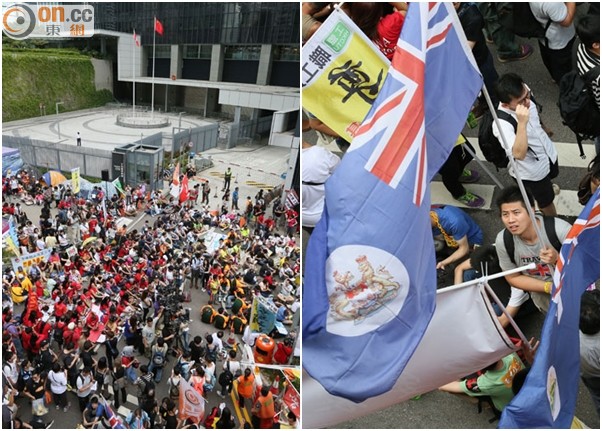
Internet comments:
- Well, I am infuriated that the HKCTU would
allow its demonstration march today be hijacked by Captain America's Hong Kong
Independence flag. That was the only thing I saw on television. I think that
HKCTU secretary-general Lee Cheuk-yan is suffering from a split personality,
especially given that Lee Cheuk-yan is a leader of the Hong Kong Alliance in
Support of Patriotic Democratic Movements in China.
- Number padding shenanigans as usual. 3,400
claimed by the organizers versus 1,400 observed by the police, or a ratio of
3,400 / 1,400 = 242%. This ratio is slightly less than the usual one (which is
300% or above).
- "I want a genuine trade union." Which one out
there is a "genuine" trade union?
- Is Speakout HK a government propaganda tool?
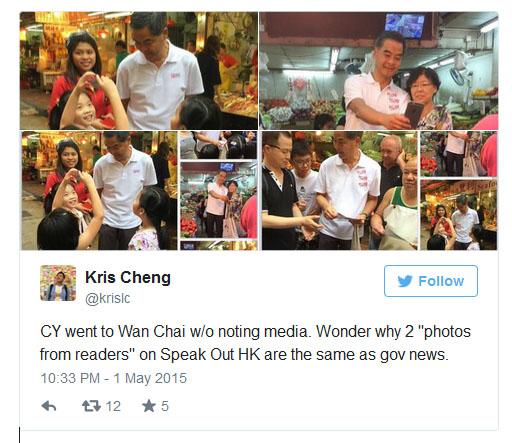
- (Speakout
HK) We used the Chief Executive's blog and Internet user tips to report on
Leung's trip. So we were faster than other media. Is that a crime? Why do the
opposition Internet media outlets want to hype this up? If you want to be even
quicker than us, you should keep a closer watch on the Chief Executive's blog.
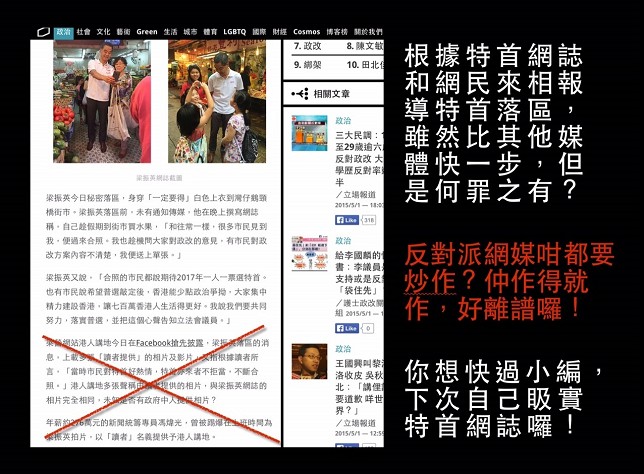
(YouTube)
Secretary for Food and Health was handing out
pamphlets at the Upper Ngau Tau Kok Estate when a radical senior male citizen
came up to him to criticize. He questioned how the 1,200 nomination committee
came out, he repeated the same points and refused to let Ko speak. Ko tried to
be polite, but the old man was more interested in putting on a show than a
dialogue. He used the nicknames of "white-haired devil woman" and "pork sausage"
to describe government officials. Ko was clearly upset and raised his volume:
"First of all, I don't agree with these characterizations. That is insulting to
certain individuals."
But the protestor continued: "You are trying to
fool small children. Right now all of Hong Kong have been fooled. How did your
1,200 come about? How did you find them?" Ko responded: "You are not listening
to what I say. You can ask your neighbors about how I talk to children. I ask
every child to listen to me all the way. I tell the children that some people
will agree and others will disagree. I tell the children to make their own
analyses, then decide to approve or object using their own independent
thinking." Then Ko said: "That's all" and turned around to leave.
Afterwards, Ko told the press that while he has
encountered opponents who chant slogans or raise questions, there was still room
for dialogue. But this particular individual was more extreme, and kept saying
that the government is deceiving the people. There is room for dialogue. Ko
admitted: "I can't always control my own emotions." He said that he will try to
use reasoning to persuade citizens and he hopes the public will understand that
he has emotions.
Internet comments:
- That uncle said nothing of substance beyond
tossing in a few choice nicknames. I wonder who are the "white-haired devil
woman" (Elsie Leung?) and the "pork sausage"? The uncle may be old, but his
behavior is like 'elementary school chicks' who make up nicknames for people.
- The uncle makes a good point. Tell him to ask
the pan-democrat legislators about why they want to veto the reform bill and
stay with the 1,200-person election committee to choose the 2017 Chief
Executive. Most of the pan-democratic legislators have ready-made nicknames
already.
(BC
Magazine) Occupy Prince Edward - Buildings Department Eviction Protest.
May 1, 2015.
Occupy Prince Edward just started outside
Pioneer Centre in protest at the Building Department’s eviction of Tsuen Wan
families from a sub-divided industrial unit two days ago. There’s lots of
people showing up in support outside the Pioneer Centre Mall, passing
sleeping mats and supplies through the cracks of locked doors to the
protestors camped out on the ground floor. The building management have
blocked the lift from stopping at the Buildings Department on the 18/F
essentially trapping those protesting the evictions there, and also turned
off the a/c to that floor.
Internet comments:
- Can't afford to buy an apartment in Hong Kong
anymore? No problem. Time to rush out to rent a sub-divided industrial building
unit in the outskirts. Then lodge an anonymous complaint with the Buildings
Department about illegal usage of an industrial building for residential
purposes. Then publicize the existence of those units with the collusion of the
Apple Daily fiction writers. Then occupy the Buildings Department after the
inevitable eviction. Then you get instantaneous allocation to public housing
instead of waiting ten years like everybody else. Do this soon, because the
industrial building prices will be soaring as soon as the precedent is set.
- This is an even better con to get public housing
than faking domestic violence.
- On one hand, the pan-democrats criticize the
government for offering insufficient public housing to meet demand, leading to
high rents and prices. On the other hand, the pan-democrats stall government
efforts to develop land for new housing. What are their motives? To fan
discontent against the government.
- "I want genuine jumping the queue for public
housing."
我要真打尖上公屋
- A more humane solution would be to mimic what
the British colonizers did to deal with the squatter towns by the hillsides. They
make a registry of all local residents in the morning. Then they came at night
to
set fire to burn them down. Afterwards they re-settled the homeless refugees into
resettlement buildings with
40 square feet for a family of five. And they can still pretend that they are so kind-hearted.
- At first, they camped out on the sidewalk in
front of Pioneer Centre with their signature yellow umbrellas:
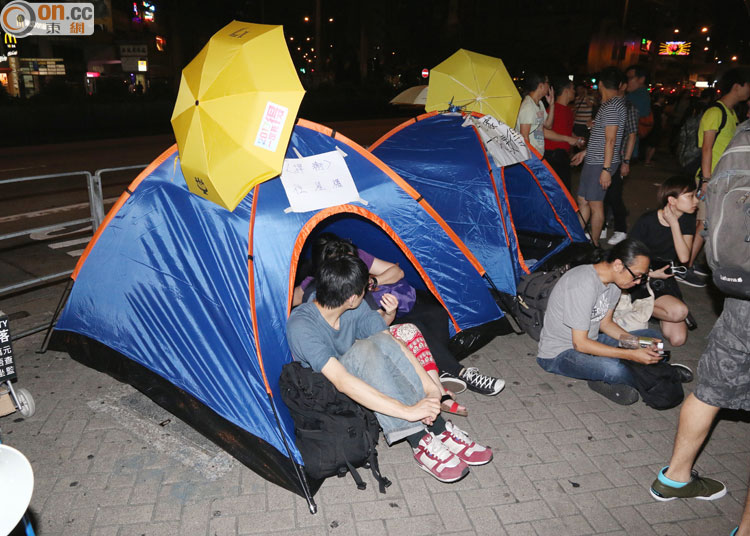
Then they found it too inhospitable (heat, rain, mosquitoes, noise). That is why they moved to the Buildings
Department offices on the 18th floor. There they have air conditioning and
restrooms. They know what's good for them.
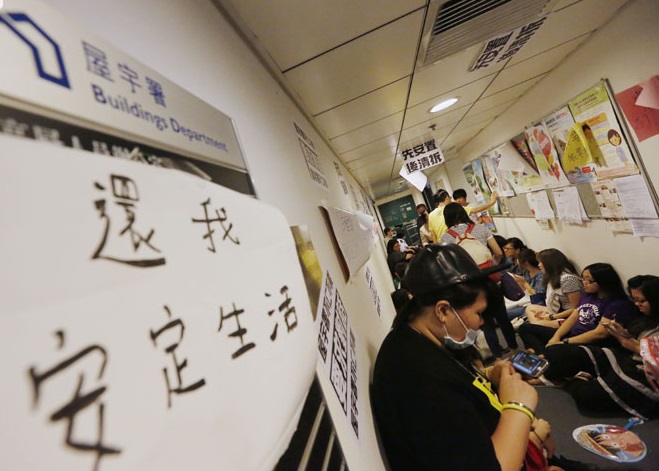
- In the name of concern over subdivided
industrial building units, the Yellow Ribbon zombies are occupying Prince Edward
in order to deprive the right of others to use the pedestrian sidewalk between
Bute Street and Nathan Road as a bargaining chip. It is so typically selfish of them to violate the
rights of others in order to attain their own goals. If you complain, they will
say: It's the government's fault!
- Why pick on Pioneer Centre? This is a
commercial building with shops on the lower floors and offices on the
upper
floors. The Building Department is one of many rent-paying tenants.
These
petitioners, social workers and civilian reporters are occupying Pioneer
Centre.
While they could argue that the sidewalk is public space, or even the
18th floor Buildings Department is theirs to occupy, the fact is the
ground lobby is
private property.
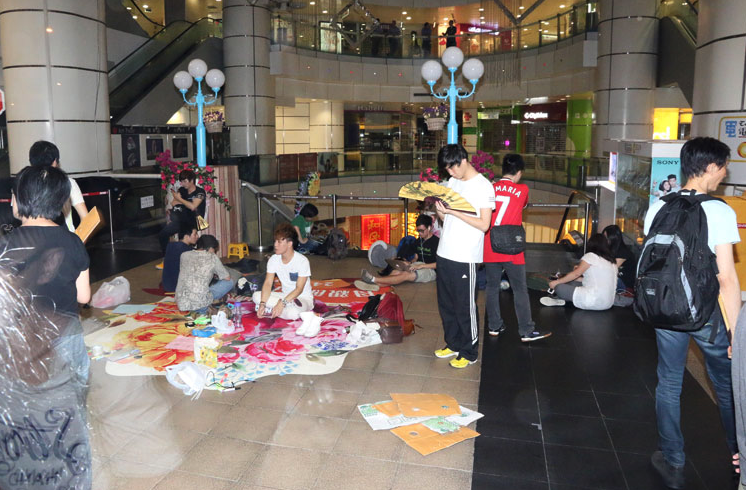
And how are the shops going to open for business with the mob in the lobby? If
the cops won't respond to their complaints, Pioneer Centre management should
obtain a court injunction immediately. Defiance of a court order is
contempt of court, which carry more severe penalties.
- Looks like these occupiers are the same
Shopping Revolutionaries. When are they going to hand out the money/drugs?
- The Subdivided Units Concern Group? It's the same group of anti-government
people who play N roles. Sometimes they play pro-democracy activists; sometimes
they play environmentalists; sometimes they play human rights activists;
sometimes they play labor unionists. They play whatever roles according to the needs of that
day.
- Why don't these non-tenant social activists take in these tenants into their
own homes?
- (Buildings
Department) How many exits did these people decide to avoid taking?
--- It is illegal in Hong Kong to use industrial buildings for residential
purposes, so they should know not to rent a unit inside an industrial building.
--- The Buildings Department issued the order to the landlord to dismantle in
2012.
--- The Buildings Department sued the landlord a second time and obtained a
verdict to dismantle on December 2014.
--- Since October 2014, the Buildings Departments social workers have reached
out to the tenants and tell them that there was no choice but to dismantle.
--- The Buildings Department contacted the Social Welfare Department to see if
the tenants meet conditions for special relief, but they do not.
--- On April 29, the Buildings Department began to seal off the units to be
dismantled.
--- The tenants were offered temporary housing in Bo Tin (Tuen Mun), but they
insisted that this was too far and they wanted some place closer to Tsuen Wan.
How about the five-star Nina Tower Hotel in Tsuen Wan?
Instead, tenant Miss Yu said that if the
government dismantles her home, then the government has the responsibility to
place her. She insists that she is not trying to jump the queue. She says that
she cannot afford to pay the outside rents of $10,000.
- The party most responsible for creating this
mess is the landlord. But the tenants rushed over immediately to the Buildings
Department office in Mong Kok instead. Somebody probably counseled them that
while it was logical to go after the landlord, it was likely to be more
effective to pressure the government. Specifically, the landlord may give you a
month's rent back at most, but the government can give you permanent public
housing.
- (Oriental
Daily, May 4, 2015) Pioneer Centre turned off its central air
conditioning system at 330am, and the hallway became hot and tepid. The staff
advised the protestors to leave but they refused. The staff called the police
who eventually persuaded the protestors to leave. But the protestors
promised to be back at 830am to speak to the Buildings Department director and
others about relocation.
(Oriental
Daily, May 4, 2015) The protestors held a press conference today to
condemn the Buildings Department for their callousness and cruelty in shutting
off the air conditioning system last night.
Well, that's swell. Pioneer Centre runs a
central air conditioning system which is usually shut off during the night for
conservation purposes. But these people demand air conditioning and lights for
their selfish selves. The bill will be paid by the Buildings Department,
obviously. Next thing you know, they want the Housing Department to cater three
meals a day too.
- In commercial buildings, tenants get metered
for air conditioning usage. That is, your rent entitles you to air conditioning
from 7am to 7pm. If your company is running overtime tonight, you call the
management and tell them what your extended hours are. They will charge you "per
hour per area."
- Pioneer Centre cut off its air conditioning.
I thought that the Occupy Central people are good at stealing electricity. So
just get one of the master electricians to hook up the air conditioning.
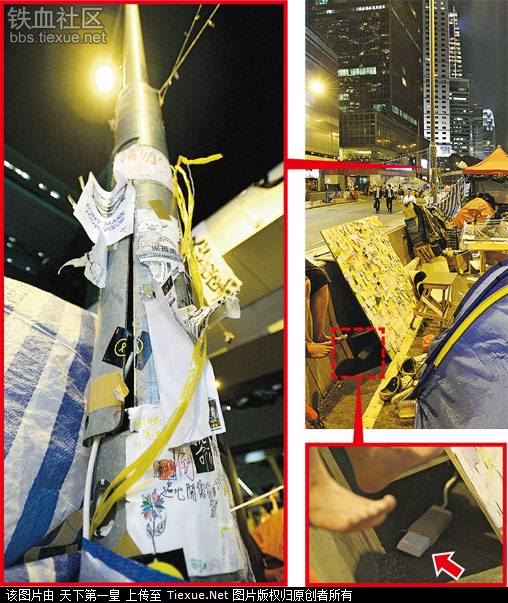
- I was listening to the radio news report.
These tenants are mostly mainlanders holding two-way visas for temporary stays.
They cannot possibly expect to get preferential treatment for housing. This is
wrong. This is very wrong.
(Oriental
Daily) May 3, 2015.
For the first quarter of 2015, the top five
container ports in the world are Shanghai, Singapore, Shenzhen, Ningbo and Hong
Kong. Previously Hong Kong was in fourth place. For the first time, Ningbo has
surpassed Hong Kong.
During the first quarter of 2015, Ningbo's
volume went up 13% to 512.4 million TEUs. Meanwhile Hong Kong is the only top
five container ports to experience a decline, going down 8.1% to 488.2 million
TEUs. Monthly statistics showed that declines occurred in all three months.
Meanwhile, neighboring Shenzhen's volume went
up. In the main Shenzhen port of Yantian, the volume went up 10.0% to 270.4
million TEUs, while the Shekou grew rapidly by 18% to 157.46 million TEUs.
Internet comments:
- Calling on Lee Cheuk-yan to come in and
finish the job. Previously Lee had egged the dock workers at the Kwai Tsing
Container Terminal to strike for 40 days. As a result, customers went to unload
in Shenzhen instead. And now other customers are leaving for Shenzhen too. Lee
Cheuk-yan is now organizing another round of labor strike to raise wages by 23%,
and that should just about kill Hong Kong off as a container port.
- Hong Kong is going to be chased down by
Qingdao, Tianjin, Dalian, Xiamen, Lianyngang, etc. Hong Kong is heading down
while the others are rising up. This is going to happen sooner or later.
- Remember when they killed the
Container Terminal 10? The reason was that the average throughput growth
at Hong Kong would be about 1.5% until 2030. Therefore it was not economically
viable to build Container Terminal 10. Well, now it turns out the average
throughput is negative! They could therefore demolish some of the older container terminals
to make way for public housing.
- If they had built Container Terminal 10 and
they had no labor strikes or Occupy Central, Hong Kong might have continued to
grow. Without the state-of-the-art Container Terminal 10, they are left with
increasingly decrepit facilities that cannot compete with the new container
terminals in mainland China. (See:
Vagabond Journey: The Yangshan Deep Water Port)
- The Third Runway at the Hong Kong
International Airport will probably end up as the same story. I recently saw a
survey of Hong Kong citizens who say that the Third Runway shouldn't be built
until it is needed. By the time you could see that it is needed, it will be too
late already since you probably need a decade for construction. Such decisions
are just not the forte of democracy, because of
bounded rationality (= the idea that when individuals make decisions,
their rationality is limited by the information they have, the cognitive
limitations of their minds, and the time available to make the decision).
In deliberative democracy, a group might want
to discuss something first rather than just vote on it (e.g. contact a citizen
by phone and ask: Do you support the construction of Container Terminal 10? The
Third Runway?) in order to lessen the effects of bounded
rationality. But when the group consists of extremists who will never budge from
their pre-established positions, discussion is futile.
- The whole business about the Hong Kong
container port is doomed to begin with. Why does Hong Kong have to bring in
488.2 million TEUs per quarter. It is not for internal consumption. It is mostly
for transshipment to destinations in mainland China. It is more expensive to use
Hong Kong (because of labor costs) and it costs more time (because the cargo has
to be moved by land through the border crossings). The only advantage is that Hong
Kong has simplified paperwork (namely, you can file the paperwork within 14 days
after moving the cargo out in Hong Kong whereas in mainland China nothing gets
moved until the paperwork is completed). Mostly, the fifth place that Hong Kong
holds is due to the largesse of the Central Government. The golden age of the
industry was in the 1980's and 1990's when China was opening up. But as mainland
ports opened up, Hong Kong's dominance began to wane. Today, it is a sunset
industry in Hong Kong. There won't be such an industry under an independent Hong
Kong City-State.
- In America, workers have the right to engage
in labor strikes in order to demand a fair salary. The recently ended West Coast
dock workers' strike shaved 1% of Q1 GDP, but that's okay because the trade
deficit also shrunk due to the undelivered imported goods sitting on the docks.
But under the authoritarian regime in Hong Kong, the government officials
collude with the businessmen such as Li Ka-shing to oppress the workers. Then
you have the fake trade unions (such as the Federation of Trade Unions) who want
to eliminate the right for collective bargaining.
- Yes, I completely agree -- that's why "I want genuine universal suffrage."
- Yeah, I remember how well Ronald Reagan and Margaret Thatcher treated striking
workers.
- Li Ka-shing colluded with the government to shrink the size of his business?
And Li is supposed to be the superman of the industry? A genius in business? You are not making any
sense!
- Li Ka-shing couldn't care less about the Hong Kong container port, because he
also owns the Shenzhen container port. All he is doing now is to move his
business from troublesome Hong Kong to trouble-free Shenzhen. Why shouldn't he,
as a businessman? You want to talk about patriotism for Hong Kong. He loves Hong
Kong but Hong Kong (at least some Hongkongers) doesn't love him.
- New demand-supply laws in economics -- when business volume shrinks by 8.1%,
wages go up by 23%. May your economy blossom!
- The only reason why mainland container ports
are faring so well is that they are copycats. They have no originality
whatsoever.
- Copycats? Do you think Hong Kong invented container ports? In this world, you
can either move forward or fall behind. Stop whining.
- China has a population of 1.3 billion and
Hong Kong has 7 million. Hong Kong is unable to handle so many mainlanders
coming and going. That is why we have to restrict mainlanders to one visit or
less per week. In like manner, Hong Kong is unable to handle so much container
volume. Therefore each shipping companies shall also be restricted to one
container or less per week. Hong Kong can return to be the sleepy fishing
village it once was.
(YouTube)
... Secretary of Justice Rimsky Yuen Kwok-keung
went to Aberdeen to promote the political reform bill. They were handing out
pamphlets at a Cafe de Coral when a kitchen worker came and shouted: "Mister,
excuse us, we are carrying out business here." Yuen immediately replied: "I
understand, I understand" and left.
Internet comment:
- I know Apple Daily is going to hype up on how
unpopular the political reform bill is. Fine. But I have a question: When the
shop owners went and told the Occupy people that they can't conduct business
with the streets blocked, how did the occupiers respond? That is, did they say
"I understand, I understand" and leave? Case study:
The Crab Restaurant Owner
- In the Apple Daily video, the government
officials patiently listened to dissenting opinions with smiles. They did not
kick any suitcases or call people names (such as "locusts").
- And since this is Apple Daily, they only collect dissenting opinions, never
approving voices.
- Rimsky Yuen should have done what the Yellow
Ribbons always do --- sing the happy birthday song!
- Why was the kitchen worker out there to speak
to Yuen about the business situation? Where was the manager or assistant manager?
One of them must be on duty at all times, and this is their responsibility. Why
did a kitchen worker take over?
- Ha ha, the Food and Environment Department
inspectors will be arriving shortly to conduct a very thorough inspection of
this Cafe de Coral!
- This kitchen worker can show up late and
leave early from now on. If the manager fires him, he can immediately call Apple
Daily and claim political persecution.
- They would never dismiss him. Instead they will assign him to work at the Sai
Kung branch. His daily commute time will be around three hours. If he shows up
late, he will be issued a warning. If he
can't take it, he'll have to resign on his own and he won't be able to complain.
- A kitchen worker at a Cafe de Coral branch
does not actually do much cooking. All food is prepared at the factory. At the
branch restaurant, the kitchen worker merely takes out the packaged food, sticks
it into the microwave oven, presses a button and takes it out to serve when ready.
- But was the kitchen workers really annoyed at
Rimsky Yuen? Or the reporters? Or, most likely, the presence of Rimsky Yuen will
draw protestors looking for media exposure. That's much more worrisome.
- This kitchen worker was very polite towards
Rimsky Yuen. Remember the legendary case of the Maxim's BBQ chef (see
YouTube). The
female customer was making a stink about why her squid was not placed
separately from the BBQ pork in the lunch box as she requested. So our BBQ chef interceded while
holding a chopper in his hand: "What the fuck is this to you?" "Are you stupid?"
Missing was the bit about "I'll fucking beat you death" before the customer got
her camera out. Interestingly, Internet opinion at the time was overwhelmingly
on the side of the BBQ chef over the Kong girl. In the case of Cafe de Coral,
the kitchen worker did not brandish a chopper.
Q1. How well do you know the
government's reform proposal for the 2017 Chief Executive election?
41%: Know very well
45%: Know somewhat
8%: Don't know much
5%: Not sure
Q2. Do you support the Chief
Executive election method under the framework of the August 31st decision?
54%: Yes
30%: No
13%: Hard to say
3%: No opinion
Q3. Do you agree that "pocket it
first" equals "pocket it forever"?
40%: Agree
49%: Disagree
9%: Hard to say
3%: No opinion
Q4. Do you think that vetoing this
proposal will held to gain an "even lower threshold"?
23%: Agree
60%: Disagree
--- 48%: The central government will
propose something similar next time
--- 12%: The central government will
propose an even more restrictive framework next time.
Q5. Do you think the current Hong
Kong SAR government will restart the consultation process if this current
proposal is vetoed?
19%: Yes
53%: No
25%: Hard to say
5%: Not sure
Q6. Some people are worried that
if this current proposal is vetoed, then universal suffrage won't happen in 2022
or 2027.
45%: Agree
28%: Half-half
23%: Disagree
4%: Not sure
Q7. Do you agree that only by
passing the current Chief Executive election proposal will universal suffrage in
the Legislative Council be possible as well as a lower threshold?
48%: Agree
36%: Disagree
13%: Hard to say
3%: Not sure
Q8. Would you say that
"one-person-one-vote to elect the Chief Executive" is closer to popular opinion
(than the current election method)?
43%: Agree
33%: Disagree
18%: Hard to say
6%: Not sure
Q9. Do you think that resistance
will change the decision of the Central Government?
19%: Yes
63%: No
15%: Hard to say
3%: Not sure
Q10. How likely is the Legislative
Council to pass the proposed Chief Executive election reform?
14%: Quite likely
49%: Half-half
33%: Not very likely
4%: Not sure
-
[225]
Why Do Poll Numbers Differ By So Much? (2015/04/30) In
#223 below, it was pointed out that
the poll results on electoral reform can be grouped into three strata: the
highest support rates come from the pro-establishment polling organizations
(such as the Hong Kong Research Association, DAB, New Territories Federation of
Associations, etc); the lowest support rates from from the pro-democracy polling
organizations (such as the Alliance for True Democracy); the middle support
rates come from the universities (Hong Kong University, Chinese University,
Polytechnic University, etc). This is going to create the impression that
polling organizations customize their poll results according to their political
leanings. Furthermore, since the Alliance for True Democracy polls and
Ming Pao polls are both conducted by the Hong Kong University Public Opinion
Programme, this is going to create the impression that university polling
organizations are selling their souls to whoever is paying the bill.
These impressions are wrong. The systematic differences arise because the
sponsors/polling organizations are asking different questions and therefore
getting different answers. There is no one right question as such, because it
all depends on what you want to know.
Here is an exegesis of some of the
survey questions.

(Alliance
for True Democracy via Hong Kong University Public Opinion Programme)
Q1. Some people think that the
"August 31st decision by the National People's Congress Standing Committee is
equivalent to turning the 2017 Chief Executive election into false genuine
suffrage." How much do you agree or disagree with this, on a scale of 0-10 (0
meaning 'disagree a lot', 10 means 'agree a lot' and 5 being half-half)?
0: 12%
1: 1%
2: 3%
3: 4%
4: 2%
5: 23%
6: 5%
7: 6%
8: 10%
9: 3%
10: 21%
Don't know/hard to say: 9%
Q1 results in grouped form
Disagree with statement (0-4): 23%
Half-half (5): 23%
Agree with statement (6-10): 45%
Don't know/hard to say: 9%
[Comment: This question is asking
for a subjective opinion about what some unspecified people are thinking. The
answer is recorded on a 0-10 scale, and the 'disagree' portion is the sum of
those saying 0-4. If the question was posed as "Do you agree or disagree with
the statement ...", the 'disagree' portion would surely be larger as some of the
23% in half-half will be siding with 'disagree.' Be as it may, you ask this
question and you get this answer. You conclude that a lot of people don't like
the August 31st NPCSC decision.
Yes, but so what? There's a lot in
life that you don't like -- not enough money; not enough appreciation from your
boss; not enough time to do everything;
not enough respect from the waitress; ... The real questions are: What happens next? What can you
do about it? If you don't have money, you can work harder and earn more, or buy
a Mark 6 lottery ticket, or rob a bank, or beg your parents to increase your
allowance, ...]

(SCMP
via Hong Kong Institute of Asia-Pacific Studies, Chinese University of Hong
Kong)
Should the Legislative Council
pass the proposal on the election of the Chief Executive by universal suffrage
based on the NPC Standing Committee framework?
41.7%: Yes, pass
45.6%: No, reject
12.7%: Don't know/hard to say
[Comment: This question is
straightforward enough: How should the Legislative Council vote? Pass or reject?
And this is the answer that you get. It is what it is. The difference with the
preceding question is that your own liking does not matter here. Indeed you may
consider the proposal to be quite odious, but you are willing to hold your nose
and 'pocket it first'. That is why the support levels rise up.]

(DAB via
Wen Wei Po)
With respect to the proposed
political reform that follows the National People's Congress Standing
Committee's August 31st resolution on one-person, one-vote for the
Chief Executive in 2017, would you like to see it passed, or would you
prefer to keep the old method of 1,200-person election committee?
60.5%: Yes, pass
30.0%: No, reject
9.5%: Don't know/no opinion
[Comment: this question is the
same as the preceding one, except that it points out that if the Legislative
Council fails to pass the proposal, the 2017 Chief Executive will be elected by
1,200 election committee members instead of 3.6 million registered voters. That is to say,
it reminds you of the consequences of 'rejection' that is not clear in a
simple pass/reject type of question. This accounts for a large part of the
differences in support levels for passing the political reform proposal.
If you want an analogy, you can
try this example. Suppose the company that you work for is in bad shape. The
company management asks you as an employee: "Do you support or oppose to make
all employees take a 10% pay cut?" The majority of the employees will oppose,
absent any other context. But what if the company management tells you:
"Either all employees will accept a 10% pay cut across the board, or else the
company goes bankrupt and everybody will be unemployed." More employees will
take the first option now.
It should come as no surprise to
find Chief Secretary Carrie Lam pounding on this point: (Ming
Pao) Carrie Lam said that the choices are simple. Either you implement
the Chief Executive universal suffrage in accordance with the Basic Law, or
else you stay in the same spot (原地踏步).
She said that it should be obvious how to choose between "making a huge step
forward" (one-person-one-vote for 5 million voters) versus "remaining in the
same spot" (1,200-person election committee).
It is just as unsurprising that
the opponents pounding on the public opinion polls that says "reject" are in
the majority without spelling out the consequences. They will simply not
answer to the question: "Why is it better to elect the Chief Executive
nominated and voted upon by a 1,200-person election committee than to have the
Chief Executive nominated by a 1,200-person nomination committee and voted
upon by 5 million voters?"
In time, though, as the
government propagandists pound more on the choice between "making a huge step
forward" versus "remaining in the same spot," the public will be more informed
about the consequences and the public opinion polls will shift more towards
"pass" away from "reject" even if the survey question does not spell out the
consequences.
Example:
Government-sponsored television
commercial:
Do not
miss the chance in 2017. "Once upon a time (in 1996), we could only
watch on television. Once upon a time (in 2007), we have no say. Once upon a
time (in 2012), this was only something among 1,200 persons. In 2017, 5
million people can participate in the choice! One-person-one-vote. Do not miss
the chance!"
Another weapon in the government
propaganda arsenal is to emphasize that if you don't pocket it now, you may
never see any new proposal again. The counter-argument that "We firmly believe
that the government will re-start the five-step process after the current
proposal is vetoed" is wishful thinking. If you do eventually get another proposal, it
will be the same one as now.
Now you can argue that this is a
false dichotomous choice and other possibilities exist. However, the immediate
consequence of a rejection of the current proposal by the Legislative Council
is that the 2017 Chief Executive election will move inexorably forward
according to the existing procedures. This is in accordance with the existing
laws. If you don't like it, you need to enact legislation to change those
laws.
You may think that there is some
vague possibility of more resistance actions (such as occupying the
Legislative Council) in order to reboot the 5-step political reform process to
get the proposal that you want. But you cannot ask a survey question such as:
"Would you like the Legislative Council pass the proposal, or reject it so
that we can occupy the Legislative Council for as long as necessary until the
Hong Kong SAR/Central governments agree to restart the 5-step political reform
process to give us genuine universal suffrage?" There are too many
hypothetical assumptions behind this type of question.]
(Ming
Pao) June 18, 2015.
Today (June 17, 2015) legislators begin to
consider the government's constitutional reform package, which will soon be
put to the vote. As significant as a landmark in history, the matter is
extremely important to Hong Kong. It depends on the outcome of the vote
whether citizens will elect the Chief Executive (CE) by "one man, one vote"
in 2017, and the outcome will have far-reaching impacts on mainland-Hong
Kong relations and interactions. It is hoped that the seventy legislators
will be wise enough to focus on the real issue, make good use of their votes
and come to the right decision in the interest of the wellbeing of over
seven million Hong Kong citizens. 广告
Many have asked the following question. If
the Legislative Council throws the package out, how will Hong Kong's
democratisation fare? So far none can provide an answer to it. The following
may actually happen. The CE will not be elected by universal suffrage in
2017, and a necessary condition for the election of all the legislators by
universal suffrage (which is supposed to follow the election of the CE by
universal suffrage) will be lacking. Therefore, if the package is thrown
out, the constitutional system will not just remain unchanged. It will
actually retrogress. Universal suffrage will not be exercised in Hong Kong
in the foreseeable future. Once it is thrown out, Hong Kong's
democratisation will be disorientated and derailed. This is what Hong Kong
will be faced with as soon as that happens.
Central government-Hong Kong relations are
of the utmost importance. They have far-reaching impacts on the SAR whether
they are well or ill handled. Many are worried that they will worsen after
the package has been thrown out. If they are beyond repair, Hong Kong will,
in the worst-case scenario, gradually approach its zenith and begin to sink.
Economically, the central government's attitude is decisive. Hong Kong is so
reliant on the mainland that, if Beijing sneezes, it will come down with
flu. Therefore, in the post-constitutional reform era, there should be
suitable "crisis management" in respect of the way Hong Kong-mainland
relations may develop. It is now imperative to avoid adding fuel to the
flame. As for the central government, even if the package is thrown out, it
should remain magnanimous and refrain from doing anything drastic to Hong
Kong lest things in it should irretrievably worsen.
Over the past two years, Hong Kong has seen
many disputes and developments in relation to constitutional reform. About
the government's constitutional reform package, one needs only to consider
two options. One is to reject it on the grounds that "screening" is by no
means acceptable. Since the August 31 framework features "screening", one
should forgo "the vote", reject the package and fight for a "screening-free"
method of electing the CE by universal suffrage. The other is to support it
on the grounds that it is impossible to get the August 31 framework changed.
One should accept "one man, one vote" first so that citizens will bring
about change by using their votes in universal-suffrage elections. Strictly
speaking, it takes only a moment's thought to determine which option to
take. Let it be left to the legislators to judge which is more in Hong
Kong's best interests and more conducive to Hong Kong people's wellbeing.
They are supposed to be wise enough to make the right choice.

(NOW
TV) April 28, 2015. NOW TV commissioned the Hong Kong University
Public Opinion Programme/Chinese University of Hong Kong, School of
Journalism and
Communication, Centre for Communication and Public Opinion
Survey/Polytechnic
University, Department of Applied Social Sciences, Centre for Applied
Social
Sciences to interview 1,167 persons from April 23-27, 2015.
Support for the Chief Executive
electoral reform proposal:
47%: Support
38%: Oppose
16%: Undecided
(NOW
TV) April 29, 2015. The latest rolling poll by the three universities
show:
Support for the Chief Executive
electoral reform proposal:
48%: Support
37%: Oppose
16%: Undecided
507 persons were interviewed
separately April 27-28 by the Hong Kong University Public Opinion Programme. If
the Central Government/HKSAR Government promises to improve the Chief Executive
election later, 66% said that they would support it, 24% opposed and 10%
undecided.
(NOW
TV) April 30, 2015. The latest rolling poll by the three universities
show:
Support for the Chief Executive
electoral reform proposal:
49%: Support
36%: Oppose
25%: Undecided
507 persons were interviewed
separately April 27-28 by the Hong Kong University Public Opinion Programme. If
the pan-democrats changed their minds and supported the political reform bill,
40% said that they would think worse of the pan-democrats, 49% the same and 12%
the better.
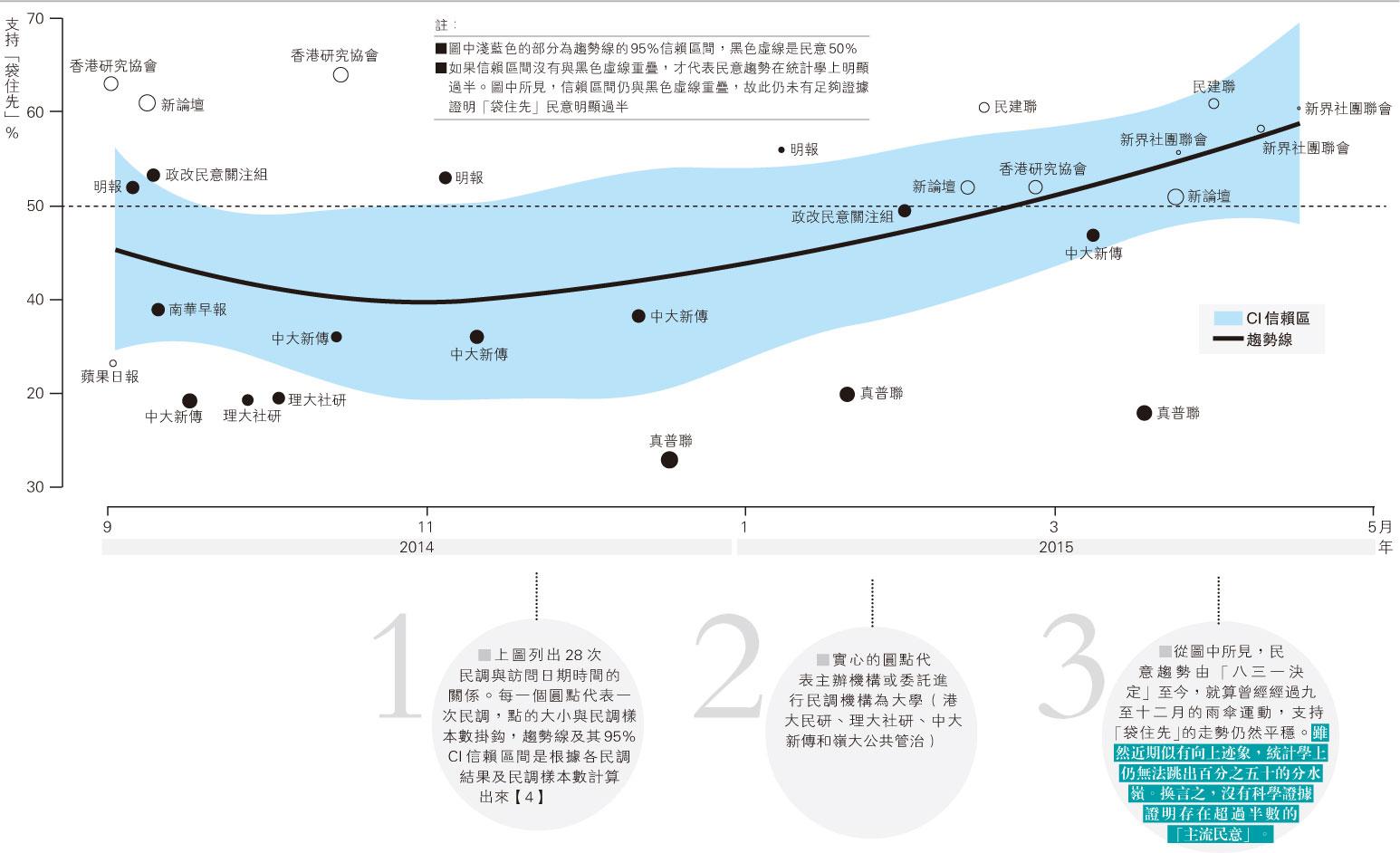
We studied the results from 28
public opinion polls with a total sample size of 25,698 person-times. 8 of these
did not indicate whether the sample was weighted to population distributions. 10
of these did not report a response rate. 5 of these did not disclose their
wording of the questions.
In summary, the 60% support for
the electoral proposal came from the Hong Kong Research Association, the New
Forum and the New Territories Federation of Associations. These organizations
have pro-establishment backgrounds. Meanwhile the Hong Kong University Public
Opinion Programme (commissioned by the pan-democrat Alliance for True Democracy)
and Polytechnic University Centre for Social Policies polls are most often less
than 30% support. Note that the first set of polls has dichotomous answers
(support or not support) while the second set of polls has trichotomous answers
(support, half-half, not support).
In addition there is a difference
between telling people that they can either "pocket it first" or "stay the same"
gives an average of 14.67% higher support than telling people they can either
"pocket it first" or "not."
Reference: (Wikipedia)
| Sample
size |
Approve |
Veto |
Undecided |
Lead |
| 11–15 Jun |
CSG/Cable TV |
1,005 |
44% |
38% |
18% |
6% |
| 8–12 Jun |
CUHK CCPOS/HKU POP/HKPU CSPS |
1,123 |
45% |
41% |
14% |
4% |
| 5–9 Jun |
CUHK CCPOS/HKU POP/HKPU CSPS |
1,117 |
41% |
44% |
15% |
3% |
| 2–6 Jun |
CUHK CCPOS/HKU POP/HKPU CSPS |
1,118 |
43% |
43% |
15% |
Tied |
| 31 May–5 Jun |
LU PGP/Public Opinion Concern Group |
1,051 |
49% |
42% |
4% |
7% |
| 31 May |
Pan-democrats meeting with Beijing officials in Shenzhen |
| 14–21 May |
CSG/Cable TV |
1,000 |
44% |
41% |
16% |
3% |
| 13–20 May |
CUHK CCPOS |
1,041 |
45% |
43% |
11% |
2% |
| 30 Apr–7 May |
CSG/Cable TV |
1,004 |
46% |
40% |
14% |
6% |
| 27 Apr–2 May |
LU PGP/Public Opinion Concern Group |
1,022 |
51% |
42% |
2% |
9% |
| 22–28 Apr |
CUHK CCPOS/HKU POP/HKPU CSPS/Now TV |
1,167 |
47% |
38% |
16% |
9% |
| 23–26 Apr |
LU PGP/TVB |
1,112 |
51% |
38% |
11% |
13% |
| 22–24 Apr |
CSG/Cable TV |
505 |
49% |
38% |
13% |
11% |
| 22 Apr |
Final
package of reform proposals tabled at the Legislative Council |
| 2–9 Mar |
CUHK CCPOS |
1,009 |
40% |
47% |
13% |
7% |
| 26 Jan–1 Feb |
LU PGP/Public Opinion Concern Group |
1,004 |
50% |
38% |
7% |
12% |
| 7–8 Jan |
HKU POP/Ming Pao |
500 |
56% |
34% |
9% |
22% |
|
2014 |
| 8–20 Dec |
CHCDJC |
1,000 |
47% |
53% |
N/A |
6% |
| 8–12 Dec |
CUHK CCPOS |
1,011 |
38% |
43% |
19% |
5% |
| 5–11 Nov |
CUHK CCPOS |
1,030 |
36% |
47% |
17% |
11% |
| 31 Oct–5 Nov |
HKU POP/Ming Pao |
1,005 |
53% |
34% |
13% |
19% |
| 8–15 Oct |
CUHK CCPOS |
802 |
36% |
49% |
15% |
13% |
| 29 Sep |
PolyU CSPS |
729 |
29% |
62% |
9% |
33% |
| 28 Sep |
Beginning of
the
Umbrella Movement |
| 11–17 Sep |
CUHK CCPOS |
1,006 |
29% |
54% |
17% |
25% |
| 4–11 Sep |
HKU POP/South China Morning Post |
1,008 |
39% |
48% |
13% |
9% |
| 5–10 Sep |
LU PGP/Public Opinion Concern Group |
1,036 |
53% |
38% |
5% |
15% |
| 1–6 Sep |
HKU POP/Ming Pao |
1,011 |
52% |
37% |
11% |
15% |
| 31 Aug–3 Sep |
LU PGP/TVB |
1,114 |
45% |
41% |
14% |
3% |
| 31 Aug |
National People's Congress Standing Committee decision |
| 6–8, 11 Aug |
CUHK CCPOS/HongKong2020 |
824 |
30% |
60% |
10% |
30% |
| 21–27 Jul |
LU PGP/Public Opinion Concern Group |
1,017 |
55% |
37% |
5% |
18% |
| 19–26 May |
LU PGP/Public Opinion Concern Group |
1,020 |
54% |
35% |
5% |
19% |
| 14–20 May |
HKU POP/Ming Pao |
1,011 |
57% |
28% |
16% |
29% |
| 21–24 Jan |
HKU POP/Ming Pao |
1,017 |
49% |
32% |
6% |
17% |
|
2013 |
| 2–4 Oct |
HKU POP/Ming Pao |
1,016 |
48% |
36% |
7% |
12% |
| 3–5 Jul |
HKU POP/Ming Pao |
1,016 |
43% |
38% |
8% |
5% |
| 15–18 Apr |
HKU POP/Ming Pao |
1,023 |
44% |
35% |
6% |
9% |
(SCMP)
When public opinion is a matter of opinion. By Alex Lo. June 18, 2015.
If there was a common theme between the
government and the pan-democratic opposition in the Legislative Council
yesterday, it is that both sides accused the other of disregarding public
opinion. They are both right about each other - and wrong about themselves.
Chief Secretary Carrie Lam Cheng Yuet-ngor
opened her speech by calling on the pan-democrats to respect public opinion,
which clearly meant their expected rejection of the government's reform
package was a rejection of public opinion. "Public opinion is clear. The
majority of Hong Kong people would like to see their right to vote being put
in place in 2017 so that there will be development of political reform,
instead of a stalemate," she said. "In my experience, in my visit to
districts, I can feel in general the public has a strong desire to have one
person, one vote … This is a very strong public opinion."
The pan-democrats likewise cited public
opinion as their guide and accused the government of manipulating it. So
pan-dem Leung Yiu-chung reciprocated by accusing the government of
subverting public opinion. "It is the Hong Kong government that disrespects
public opinion," he said. "The government, which claims it respects public
opinion, is pretending. What they say is different from what they do."
If Hong Kong has become highly politicised,
there is no other issue that is more polarising than democratic reforms.
Week after week since late April, the
government and various civic groups and political parties have conducted
surveys on the state of public opinion, and what they all showed, despite
minor variations, is that we are basically split down the middle. Latest
numbers are 44 per cent for the package and 40 per cent against.
Given the substantial numbers on both
sides, it's easy but also disingenuous for the government and the opposition
to claim they have public opinion on their side.
The tragic irony of Hong Kong today is that
we have all the attributes of division, quarrel and polarisation
characteristic of many democracies without their viable electoral systems.
And it's possible it will be stuck in this electoral no man's land for a
generation.
Should the election reform based
upon the August 31st framework by passed or rejected by the Legislative Council?
50.9%: Pass (11.9% among pan-democrats)
37.9%: Reject (80.4% among pan-democrats)
11.0%: Don't know
Do you accept the proposal itself?
34.3%: Accept
35.5%: Do not accept
25.1%: Half-half
If you had supported a legislative
councilor before but he votes differently than your preference, would you vote
for him the next time?
66%: No (71% among pan-democratic voters)
If the electoral reform is not
passed, whose fault is it? (multiple choices allowed)
41.6%: Pan-democrat legislators
37.3%: The Hong Kong SAR government
30.5%: The Central Government
14.3%: pro-establishment legislators.
Q1. The Chief Executive election
proposal says that a candidate must be nominated by at least 120 but not more
than 240 of the 1200 nominating committee members. Can you accept this?
65%: Accept
25%: Do not accept
7%: Don't care
3%: No opinion
Q2. In the primary stage, the
Chief Executive election proposal says that each nominating committee can vote
for at least two of the candidates. The top three vote-getters will become
official candidates. Can you accept that?
61%: Accept
33%: Do not accept
5%: Don't care
1%: No opinion
Q3. At the election stage, the
Chief Executive election proposal says that the top vote-getter in a single
round is the winner. Can you accept that?
62%: Accept
28%: Do not accept
6%: Don't care
4%: No opinion
Q4. Do you think that the Chief
Executive election proposal has more, less or the same elements of democracy
than the present system?
69%: More
12%: Less
15%: The same
3%: Hard to say
2%: No opinion
Q5. Do you think the Legislative
Council should pass or reject the Chief Executive election proposal of the
government?
63%: Pass
29%: Reject
5%: Hard to say/don't care
3%: No opinion
Q6. When Legislative Councilors
hold positions that are contrary to majority popular opinion, do you think the
they should vote according to majority opinion?
75%: Yes
13%: No
8%: Hard to say/don't care
4%: No opinion
Q7. How confident are you that the
Legislative Council will pass the 2017 Chief Executive election proposal?
6%: Very confident
13%: Somewhat confident
35%: Slightly confident
30%: No confidence
11%: Hard to say
5%: No opinion
Q8. Do you the pan-democratic
legislatives will be able to get a better and more democratic Chief Executive
election method by rejected the current proposal?
21%: Yes
69%: No
9%: Hard to say
1%: No opinion
Lee Lik-chee is a Hong Kong film
director, best known for movies such as From Beijing with Love (1994) and The
God of Cookery (1996) (see
IMDB).
(Speakout HK at YouTube)
https://www.youtube.com/watch?v=epvS-dm6oBw
You say "international standards."
Which nation's standard then? The standard for Earth? As an example, I like to
do comedies. I make up jokes. I make up a joke. Okay. I make up a joke. I tell
it to you. You don't find it funny. I tell you another one. You don't find it
funny either. No matter what I tell you, you don't find it funny.
"Hmm."
"Don't just say 'hmm' to me. What
do you want?"
"I want a genuine joke." "I
want a genuine joke. Yours are false jokes."
"So what is a genuine joke?"
"Ehh ..."
"You can't just say 'ehh'."
"International standards."
"What are the international
standards? Don't talk nonsense."
" I want a genuine joke." " I want
true love!"
(laughter) "Wait, what is true
love? There is true love everywhere. How come only the love that you talk about
is genuine?"
"You want genuine universal
suffrage? What is genuine universal suffrage? You can't come up with a proposal.
You are just repeating the script. (mumble) You have been saying that for
several years already. Then what? You don't have any ideas. Stop fooling
around. This is like small children playing in the sandbox.
(Headline
Daily) April 27, 2015.
Some people were unhappy with Lee
Lik-chee's comments on YouTube. We interviewed Lee Lik-chee. He said that he was
using an analogy with telling jokes, so people do not have to take it too
serious and engage in a war of words. "You can say that I am stupid, you can say
that my jokes are not funny, but you should not stop someone from having his
say." He said that the world is chaotic enough with the Nepal earthquake and
ISIS threatening terrorism across the globe. Therefore his critics need not
create more chaos on the electoral reform issue. Lee Lik-chee expressed some
helplessness, and thinks that he won't comment on the electoral reform issue
again so that his family won't have to worry.
Comments:
- See
#197 on the matter of
international standards for universal suffrage.
In answer to Lee Lik-chee's question:
What are the international
standards that make for genuine universal suffrage as defined by the
pan-democrats?
Genuine universal suffrage is: One-person-one-vote for the Chief
Executive with candidates being anyone who can come up with a minimum number of
signatures in support (that is, civil nomination).
Ma Ngok says 32 out of 196 United
Nations members have civil nomination of their leaders, but not including the
United States, the United Kingdom, China, France, Germany, Italy, Spain,
Australia, New Zealand and Japan.
The Basic Law says that the
candidates should be nominated by a nomination committee and not by civil
nomination.
(Oriental
Daily) April 26, 2015.
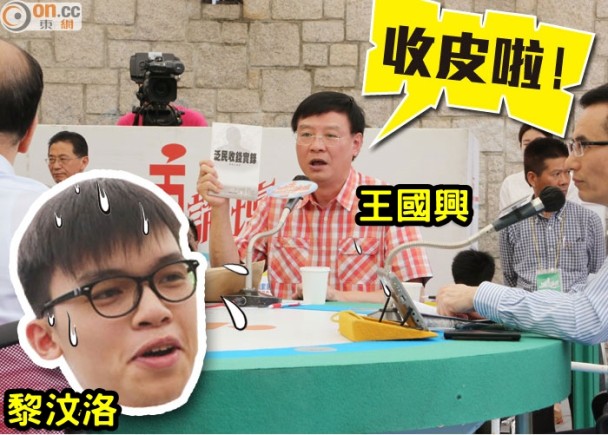
At the RTHK Forum, Scholarism
spokesperson Oscar Lai pointed out that the Chief Executive nomination committee
was unfair because 9,000 persons represented several hundred thousand workers to
elect 60 committee members for the labor sector. Federation of Trade Unions
legislator Wong Kwok-hing pointed out that the Federation of Students
secretary-general was not directly elected either. During this exchange, Wong
used the term "收皮".
The use of this vulgar term may violate the broadcasting regulation.
Oscar Lai demanded Wong to
apologize, saying that the pro-establishment camp has often accused the
pan-democrats of using foul language even as they do the same thing. Wong
declined to apologize and refused to withdraw his statement.
Video:
https://www.youtube.com/watch?v=vaq7TOoOAeQ
This news story is not being
reported in English. One reason might be that it is too trivial. Another reason
is that there is no good translation of the term.
(Apple
Daily) November 22, 2013. By Civic Party legislator Claudia Mo Man-ching.
The term "收皮"
is not foul but crude.
There are various speculations on
the origin of the term. One speculation is that it is used in the gambling game
fantan to announce the termination of the session. So it means
"Let's close shop!" In the context of what the legislator was saying, he meant
to tell the other party: "Get lost!" "Pack it!" or "Beat it!"
Internet comments:
- Is the term crude, vulgar, foul,
indecent or obscene? Someone suggests that a test might be for legislator Wong
Kwok-hing to use it inside the Legislative Council and see how the chairman
might react. Well, it's been done before by pan-democrat legislator Leung
Kwok-hung.
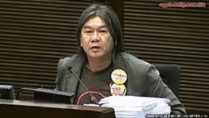
- Interestingly, there is a video
https://www.youtube.com/watch?v=XrPupreWu7I of actor Stephen Chow saying
on Comedy Central with the translation being "flowers." Yes, "flowers."
Those subtitles are deliberately error-filled. This is clear as the words
clearly are not matching the emotions being displayed. But that's quite alright,
because this is Comedy Central. Unfortunately, you can't fully appreciate the
humor in the transcript unless you are bilingual. Here is the comparison between
sub-titles and the translation of what he actually said.
Subtitle: That question truly touches my
heart.
What he actually said:
(What the hell! I have had enough. What do you want to ask?)
Subtitle: Your wisdom is an inspiration.
What he actually said:
(Huh? All evening you keep asking me stupid questions.)
Subtitle: Your very essence soothes my soul.
What he actually said:
(Who do you think I am? Are you making fun of me? Huh?)
Subtitle: Yes. Just knowing you makes me a
better man.
What he actually said:
(Must you make me angry?)
Subtitle: You are strikingly attractive.
What he actually said:
(A piece of mud cannot be made to stand up. That's people like you.)
Subtitle: I'm Stephen Chow, you're watching
Savior Sunday on Comedy Central. Go see my new movie, "Kung Fu Hustle."
What he actually said:
(You are so trashy.)
Subtitle: Flowers.
What he actually said:
(Pack it in!)
- What do the Localists think? The
term "收皮" is a
quintessentially Hong Kong term and outside of the mainland Chinese vocabulary?
- If saying "收皮"
is a crime, then what about singing "Fuck
the police" at Lingnan University?
- If saying "收皮"
is a crime, then what about primary school teacher
Alpais
Lam telling the police, "What the fuck!"?
- If saying "收皮"
is a crime, then what about Scholarism member
Tiffany Chin Sze-man's
remarks at the Legislative Council?
- One year ago, Wong Kwok-hing
may not be using the term for fear of offending certain middle-of-the-road
voters. Today, after the Umbrella Revolution, he sees an advantage to using
the term because it appeals to certain middle-of-the-road voters. The more
upset Oscar Lai and Frederick Fung get, the more votes Wong Kwok-hing gets.
- By arguing over this term,
the two sides have managed to make the public completely ignore the
substance of their dialogue altogether. Does anyone know what they talked
about?
(Apple
Daily) 00:30 April 27, 2015.
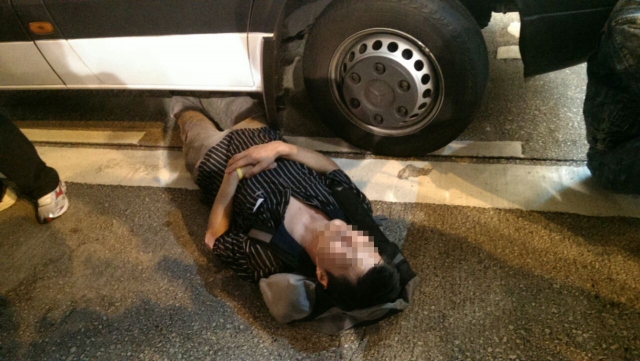
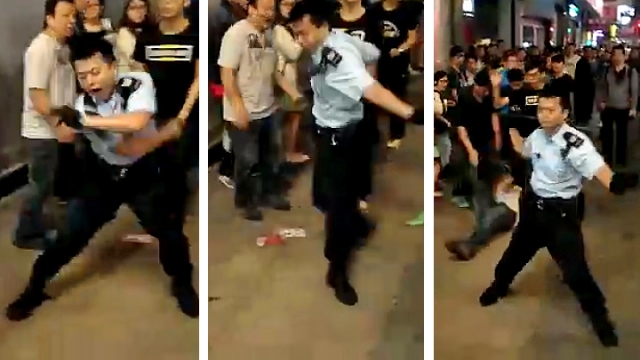
At around 11pm last night, about
100 demonstrators clashed with the police on Nathan Road outside Sino Centre in
Mong Kok. At first, both sides were restrained and only engaged in verbal
arguments. Suddenly a woman crawled underneath a police vehicle parked on the
roadside. The police pulled her out and put her inside a police vehicle.
Immediately several demonstrators surrounded that police vehicles and 40 other
demonstrators rushed onto the roadway. A large number of police reinforcements
showed up and used megaphones to ask the demonstrators to step off the roadway.
The demonstrators yelled: 'The police are arresting people without cause!' and
'Are the police omnipotent?' The police used batons and pepper stray to disperse
the demonstrators. The incident lasted about 30 minutes before the crowd
dispersed. The police arrested 5 persons, including the 1989 June 4th activist
Wang Deng-yao, "The
Painter" and Captain
America.
(Apple
Daily) 02:33 April 27, 2015.
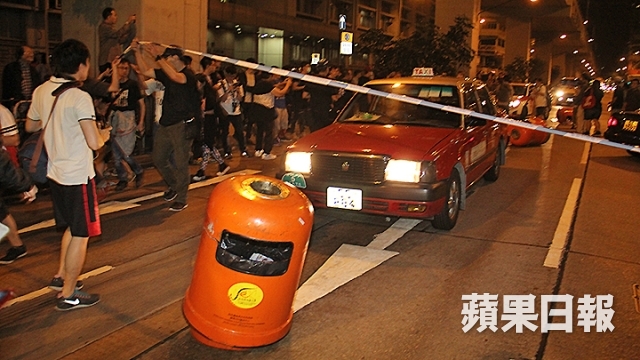
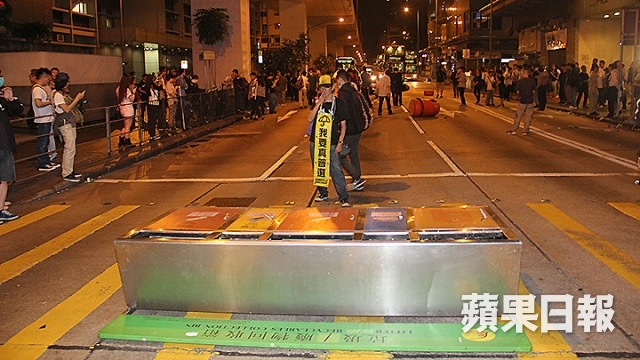
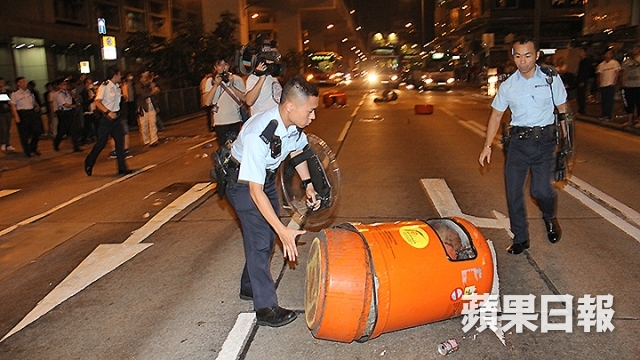
After the clash outside Sino
Centre in Mong Kok, 200 citziens proceeded to Mong Kok Police Station on Prince
Edward Road to express their support. The police station lowered its iron gate.
A taxi coming down the road almost hit a demonstrator, and the other
demonstrators surrounded the taxi. The police had to come up to rescue the taxi
driver.
At around 2am, the demonstrators
dumped garbage cans, recycling bins and other rubbish onto Prince Edward Road to
block traffic. The oncoming vehicles had to turn into Sai Yeung Choi Street
South to proceed. About 10 minutes later, about 20 police officers with shields
came out, dispersed the crowd and moved the garbage off the roadway.
(Oriental
Daily) 02:41 April 27, 2015.
At around 1am, a group of
demonstrators who oppose the electoral reform gathered outside the Mong Kok
Police Station in support of five demonstrators who were arrested earlier
outside Sino Centre. The police station gates were lowered. At first, about 40
demonstrators were gathered there but the number eventually grew to 200.
During this time, a man charged
onto the roadway. The driver in an oncoming taxi braked quickly to avoid hitting
the man. The taxi was surrounded by more than a dozen demonstrators. The police
mediated and the taxi was able to leave.
At around 2am, some demonstrators
moved four garbage cans onto the road to force vehicles to change routes. More
than 20 police officers armed with shields came out of the police station and
moved the garbage cans off the roadway. They also forced the demonstrators back
on the sidewalk.
By 3am only several dozen
demonstrators were left.
(i-cable)
04:51 April 27, 2015
About 50 demonstrators began to
blockade Mong Kok Police Station to demand the release of the persons who were
arrested earlier at Sai Yeung Choi Street South.
The front gate of the Mong Kok
Station was lowered. The demonstrators pushed garbage cans and a recycling bin
onto Prince Edward Road West to block oncoming traffic. One demonstrator claimed
to have been hit by a taxi and demanded police help. The taxi driver was let go
and the road was re-opened fifteen minutes later. But the police continued to
gather outside the police station.
(Oriental
Daily) 09:07 April 27, 2015.
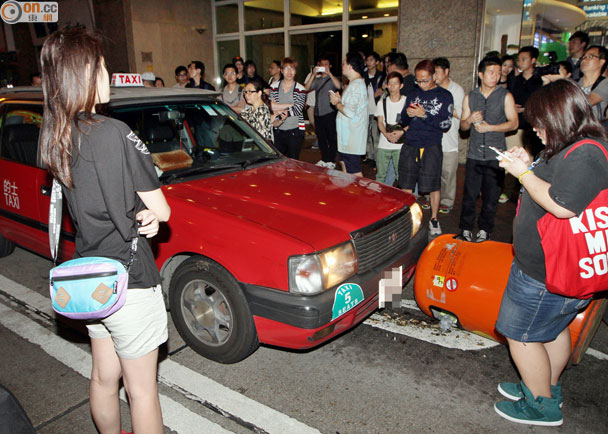
At around 1am, a 57-year-old taxi
driver was driving down Prince Edward Road West in the direction of Tai Kok Tsui.
When he got to the opposite side of Mong Kok Police Station, there was a crowd
of 100 demonstrators protesting the electoral reform package. There was an
argument between the taxi driver and the demonstrators over the obstruction of
the roadway. The demonstrators pounded on the taxi and then they dispersed when
the police came. The taxi driver got out of the car and found scrape marks on
the taxi. He filed a report, and this case of property damage is being followed
by the Crimel Investigation Department.
(TVB
with video news report) 09:03 April 27, 2015. Also:
https://www.youtube.com/watch?v=F3a0hlbPqKY
(01:38) When our news vehicle
arrived outside the Mong Kok Police Station, a group of people surrounded,
pounded on it, threw water water bottles at it and used foul language to curse
out the cameraman inside the vehicle. Our station strongly condemns such violent
behavior, because it is a serious infringement of freedom of press.
(Wen
Wei Po) April 28, 2015.
At around 11pm, about 100
anti-electoral reform demonstrators were walking along Nathan Road near Sino
Centre. When they came to Dundas Street, they quarreled with citizens holding
different views. The police showed up to separate the two sides. Someone claimed
that he was pushed to the ground, and the police took away some of the
troublemakers. Some demonstrators were displeased and one of them crawled
underneath a police vehicle to prevent it from leaving. Someone else attempted
to snatch a police baton in order to attack an officer. The police used pepper
spray and baton to disperse the crowd.
Later on, several dozen
demonstrators gathered outside the Mong Kong Police Station and called for their
people to be released. It was tense. The police lower the front gate, and posted
policemen with shields and batons. At 130am, some demonstrators charged onto
Prince Edward Road West outside the police station, and quarreled with a taxi
driver who was filming them. They claimed to have been hit by the taxi and they
pounded on the body of the taxi. One person fell on the ground and said he had
been hit by the taxi. Others moved garbage cans and other materials onto the
roadway to block traffic. This caused the westbound traffic on Prince Edward
Road West to be obstructed, and the cars had to make detours. The police
eventually cleared the road.
The police said that five police
officers were injured yesterday. Six men were arrested. Five are not out on bail,
and the sixth is still being held because he could not produce any
identification.
(Apple
Daily) April 30, 2015.
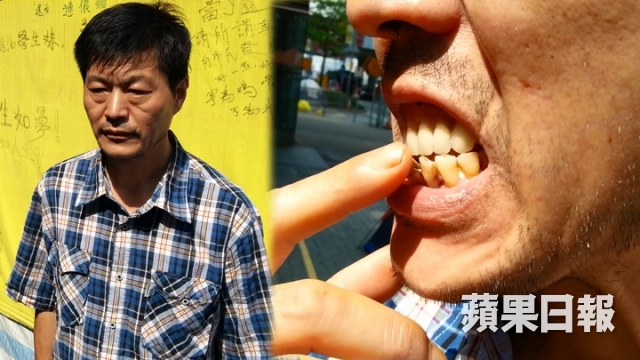
1989 June 4th movement activist
Wang Deng-yao recalled that he crawled underneath a police vehicle in order to
prevent its departure. "I did not resist. When he grabbed me, I came out." But
then the police took him over to the van, "They immediately pushed me inside the
van. I did not want to go with them. So they lifted me by the feet and head so
that I was suspended in the air."
He said that he was lying on the
floor in the van. Then someone kicked him hard in the head. He used his hands to
shield his face. Then someone kicked him on the lower left jaw and punched him
on the shoulder several times. Afterwards, his front tooth came lose and his
lower jaw was swollen for a few days. He said that he will be filing a formal
complaint to the Hong Kong Police Complaint Systems.
Internet comments:
- So Wang crawled underneath the
police vehicle to prevent its departure. Fine. Then he said that he came out
immediately as soon as the police grabbed him. Can he make up his mind? If he
wanted to prevent the police car from leaving, he shouldn't be coming out
without extreme force. If he was willing to let the police car leave, he should
not have crawled underneath it. The whole thing is poorly considered.
- Please! Do they have to show the
close-up of his teeth? They are stained and suffering from gingivitis. The teeth
would have fallen off by themselves. This is grossing me out.
- They must be running out of
money. Nowadays they are hiring mainlanders for the Shopping Revolution. But
isn't hiring a Locust for anti-Locust actions a self-contradiction?
- Not the first time that a
mainlander lunatic showed up in the Shopping Revolution - see
#134.
Videos:
(TMHK)
https://www.youtube.com/watch?v=MTxESB74rNs Demonstrators arguing among
themselves over strategies, calling each other "stupid dicks." Then someone told
the camera: "Cut off the filming because they are arguing."
(TMHK)
https://www.youtube.com/watch?v=A6N6QEDPo88 One party in the argument was
"Four-eyed brother" Cheng Kam-mun (of the defunct Student Front) who said that
he was complaining about League of Social Democrats vice-president Ng Man-yuen's
failure to take action because Ng was too busy drinking in a nearby bar
(TMHK)
https://www.youtube.com/watch?v=-ZLg9p-txzk League of Social Democrats
vice-president Avery Ng Man-yuen started to say that he doesn't drink alcohol PERIOD
and he was only drinking orange juice at the time.
When Cheng told him about the incident down in Mong Kok, he checked on the
Internet and made certain arrangements. However, he did not feel that there was
any point to start another Occupy flashpoint in the middle of a Sunday night and
with only 100 people around.
(Joel Christian)
https://www.youtube.com/watch?v=h-h7zi1VvvI Demonstrators chanting "I want
genuine universal suffrage." The police form a human chain to prevent
demonstrators from stepping onto the roadway.
(Joel Christian)
https://www.youtube.com/watch?v=DeqbxsJS7e4 A woman kept chanting "Garbage!"
and "I want genuine universal suffrage" while the police reminded her: "Please
look out for your own safety" as she moved around.
(Joel Christian)
https://www.youtube.com/watch?v=uNI1Hm2gnUY A TVB News Channel vehicle is
surrounded by the demonstrators who didn't want it to be there because of
perceived political preferences. Wonder what the Journalist Association has to
say about this infringement of freedom of press by freedom fighters?
(Joel Christian)
https://www.youtube.com/watch?v=uNI1Hm2gnUY A man stood outside the Mong Kok
Police Station and invoked magical strengths by speaking in tongues for the
arrestees to be released.
(Joel Christian)
https://www.youtube.com/watch?v=nTuSQdQUTD0 Demonstrators wandering in and
out of the Prince Edward Road West roadway, not being sure whether they really
want to block all traffic.
(Joel Christian)
https://www.youtube.com/watch?v=bcvq31Dmu1w Demonstrators surrounded one
taxi. which they accused of hitting somebody.
(Joel Christian)
https://www.youtube.com/watch?v=Hn_Kj2vI3m4 Garbage cans on Prince Edward
Road West.
(Joel Christian)
https://www.youtube.com/watch?v=7i5Z863eP8Q Demonstrators attempt to pile
more garbage on the road to impede traffic.
Internet comments:
- Hey hey, CY Leung, all of 200
people want you to cancel the electoral reform. So you better listen to them and
do it!
- When the pro-democracy activists
know that their adversaries are making an appearance, they rush out to interfere
and out-shout. When the pro-democracy activists make their own appearances, they
step out onto the roadway to paralyze traffic in order to gain attention.
- According to Resistance Live on
Facebook, the events started when a Blue Ribbon accused Captain America of
assault. The police took regular demonstrators Captain America and The Painter
down to the police station. A couple people threw themselves underneath the
police van to impede progress. They were arrested too. It is hard to see how the
Revolution could begin with the arrest of a couple of mental patients. Do you
challenge the classification? Here is some photos of The Painter.
Captain America has
his own section.
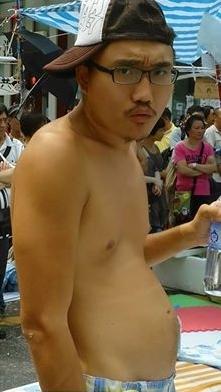
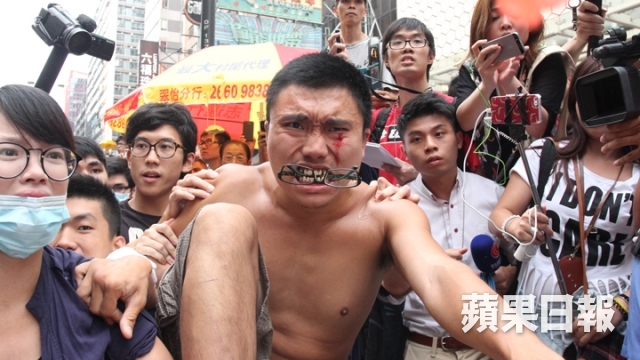
- They want to stop the electoral
reform.
Did throwing oneself under a police van on Nathan Road bring the goal closer?
Did waving the British colonial flag for Hong Kong independence bring it closer?
Did stepping on Nathan Road to stop vehicular traffic bring it closer?
Did stopping an arrest bring it close?
Did getting arrested for stopping an arrest bring it closer?
Did yelling outside the Mong Kok Police Station bring it closer?
Did throwing garbage cans/recycling bins on Prince Edward Road West bring it
closer?
Did drinking at the bar behind the Mong Kok Police Station bring it closer?
Did arguing with a fellow traveler bring it closer?
Did arguing with a fellow traveler and being recorded on film for YouTube/Facebook
bring it closer?
...
- On the Hong Kong Internet, this
gif animation is legendary:

Many people do not know the meaning at first. The point is that the two fighting
birds "dropped down into the street." That is, they puk gai (仆街).
(Wikipedia)
Puk gai literally means "falling onto street" which is a common curse
phrase in Cantonese that may be translated into English as "drop dead."
A variation of the gif is this:

This time, the two birds are in gold color. They are called "The golden-winged
Puk Gai birds" which is like saying "This time they are screwed."
The argument between "Four-eyed brother" Cheng Kam-mun and League of Social
Democrats vice-president Ng Man-yuen is exactly one in which both sides are
screwed, especially given the publication of the videos.
- When the police came out to
remove the garbage cans on the road, they took videos of those present. This got
the demonstrators really upset and they chanted "Black Police!" If you are doing
the right thing, what are you afraid of?
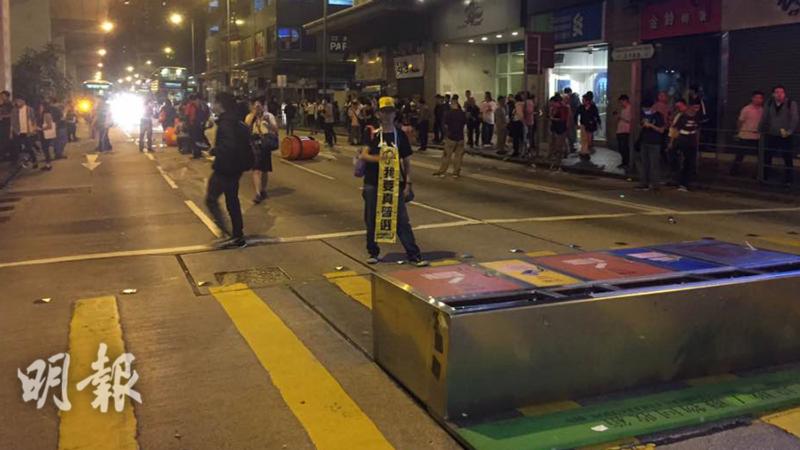
Banner: "I want genuine universal suffrage."
- Look at the photo above of
Prince Edward Road West. This is a three-lane car road and the one pedestrian
sidewalk is on the right hand side. The MTR station is in the intersection
across the Park 'n Shop. The Mong Kok Police Station is a multi-storey building
to the left of the photo. To get to Prince Edward Road, you have to cross one
pedestrian sidewalk, two car lanes designed solely to provide access the police station
and the underpass of the four-lane vehicular overhead bridge (which you can see on
the left side of the photo). That area in front of the police station (including
pedestrian sidewalk, two car lanes and bridge underpass) can easily accommodate one
thousand demonstrators. But the 100 demonstrators spilled onto the Prince Edward
Road West to block car traffic. They did it not because the crowd was too big
for the space. They did it for Occupy reasons -- inflict maximum pain on
innocent citizens (at 2am, that would be mostly taxi drivers, night bus drivers,
late shift workers, etc) because they don't dare provoke the police themselves.
- When the taxi driver wanted the
demonstrators to move off the roadway so that he can pass, he was cursed out and
his taxi was damaged. It is argued that the road does not belong to cars, and
the demonstrators can take it over for their own purposes (just like in the
Occupy Revolution).
- When the anti-parallel trader demonstrators wanted the mainland parallel
traders/shoppers/tourists/immigrants to leave Hong Kong, they cursed out the
mainlanders, attacked them and kicked their suitcases. It is argued that the
road belongs to the local residents, and the mainlanders must not be allowed to
stand on it.
- This is the contorted logic of the Occupy/Umbrella Revolution. Actually there
is no logic as such, but just selfishness and narcissism.
- From People Power's Tam Tak-chi's
Facebook:
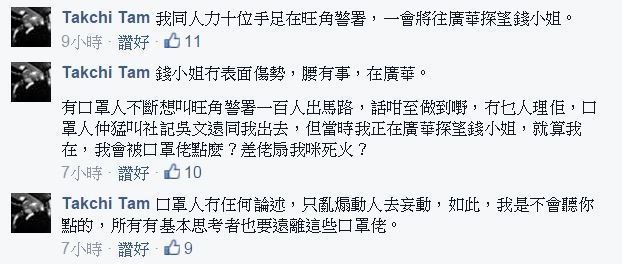
"- I am with ten other People Power brothers down at the Mong Kok Police Station.
I will be going to Kwong Wah Hospital to visit Miss Chin.
- Miss Chin has no observable injuries. She has a hip problem. Down at Kwong Wah.
- Some masked men kept calling on the hundred or so persons down at the Mong Kok
Police Station to charge onto the roadway. They said that this is the only way
to get something done. Nobody listened to them. The masked men wanted me and
League of Social Democrats' Avery Ng Man-yuen to go out. At the time, I was
visiting Miss Chin at Kwong Wah. But even if I was there, would I be misled by
the masked men? What if the police trap me?
- The masked men had not narrative. They only incite others to take rash
actions. As such, I won't listen to you. Any thinking person should stay far
away from those masked men."
- (Speakout
HK) Where is the Journalist Association?
The TVB news vehicle was
surrounded by citizens who "loved democracy and freedom" and who also cursed out
police officers with foul language. These citizens pounded on the vehicle, threw
water bottles and cursed out the news team with foul language. They told the
news team to leave.
The Journalist Association has
been known as working tirelessly to defend freedom of press in Hong Kong. So
far, not a single word has come from them to condemn the relevant "citizens."
Compared to what happened to Apple
Daily or Ming Pao, such as individual columnists or even Jimmy Lai being bombed
with feces, those don't even have anything to do with freedom of press. However,
the Journalist Association bounce over to issue statements at maximum speed. But
now they are completely visible!
The only plausible explanation is
that the "citizens" pounded on, tossed water bottles at, cursed out and gave an
order to leave to a vehicle but not a person. It was an inanimate object and not
a living person. This was not a life-or-death situation and therefore the
treatment varied.
But on further thought, the
freedom of press that the Journalist Association is defending is also an
inanimate object. Mere words only. Therefore, they have fought the wrong fight.
They should be fighting for freedom of press individuals, freedom of speech
individuals or editorial independence persons.
Do such persons exist in
humankind? If not, then what was the Journalist Association doing all these
years?
- The Journalist Association watch
has ended. The world was waiting to see how long it would take the Journalist
Association to respond to the TVB news vehicle incident. Since the perps were
pro-democracy activists, they are likely to agonize over the wording of any
statement.
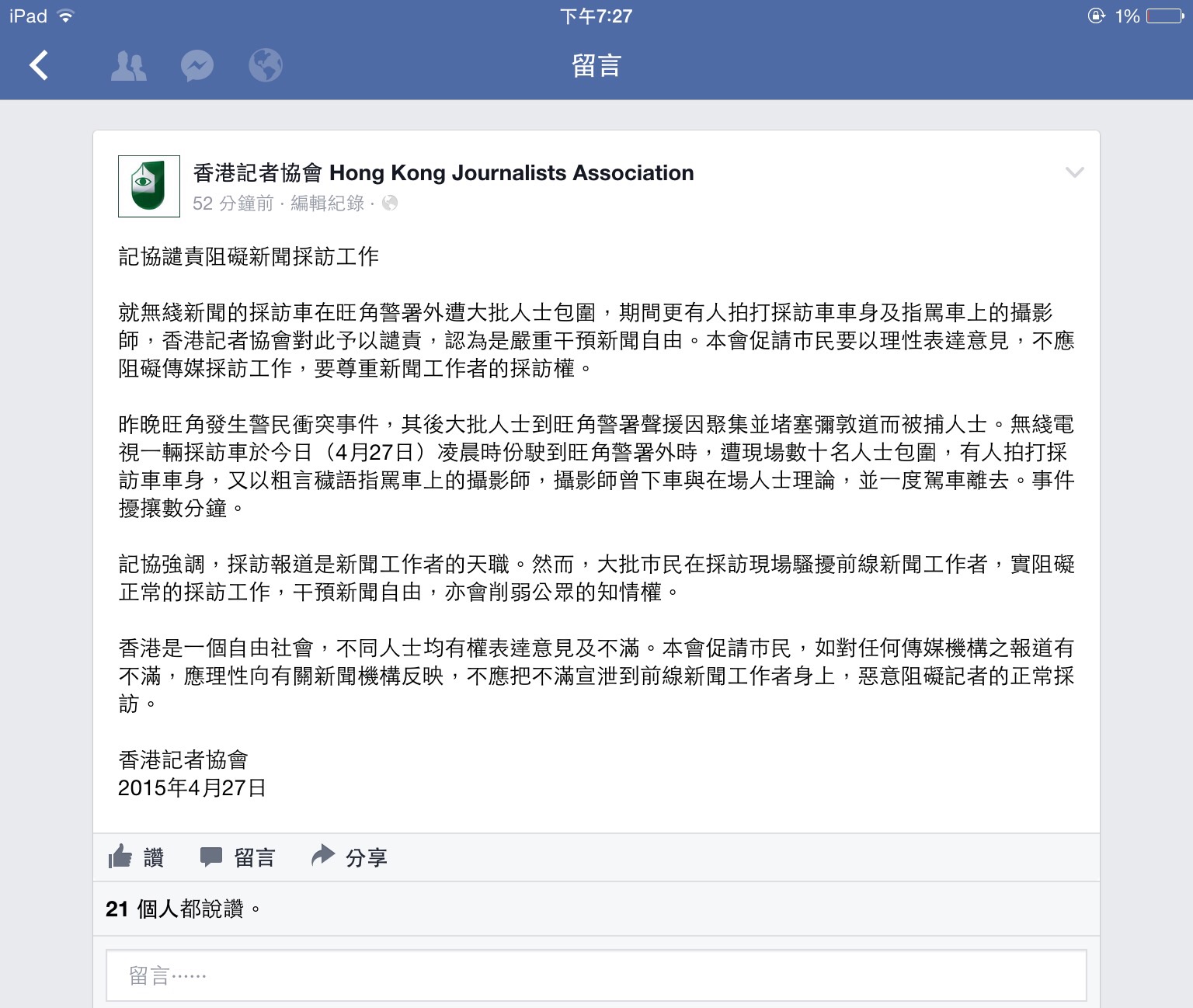
But still, this statement is mysterious sounding. According to JA, the incident
was one in which "a large number of individuals" went down to the Mong Kok
Police Support to show their support of those individuals who had assembled and
blocked Nathan Road earlier. The JA further says that the TVB news vehicle was
surrounded by "a large number of individuals" and during that time "someone
banged on the body of the vehicle and cursed out the driver and cameraman."
"A large number of individuals"?
"Someone"? But you won't say that it was an unlawful assembly, or that blocking
the roads is an offense, or that some of these individuals were arrested for
physical assault?
The survey question was: "If the
listed Legislative Councilor voted against the constitutionally legal electoral
reform proposal, will you vote for him/her at the next Legco election?" The
survey results are:
89.8% against Democratic Party
legislator Albert Ho Chun-yan
88.4% against League of Social Democrats legislator Leung Kwok-hung
88.1% against Labour Party legislator Lee Cheuk-yan
88.1% against People Power legislator Albert Chan Wai-yip
87.5% against Civic Party legislator Alan Leong Ka-kit
87.1% against Civic Party legislator Claudia Mo Man-ching
85.1% against Democratic Party legislator Emily Lau Wai-hing
[Unfortunately, these survey
results imply that the last six will be re-elected. That is because their seats
are elected by proportional representation. For example, in Hong Kong Island
district, 7 seats were up for election and the top seven vote-getters are in. So
anyone with 14.7% of the votes is guaranteed to be in. In practice, the top
vote-getter may get 20% and the seventh vote-getter may squeak by with only 7%
or 8%. Albert Ho is in the District Council (Second) Functional Constituency
where the top five win. Therefore, he will need at least a 14% or so to get in. The
point is that proportional representation is designed for the legislative
councilors to serve the narrow constituency which elects them -- they don't need
to win with a majority; they only need to win by the necessary amount which may
come from a marginal group.]
While there are statistical
compilations on the legal cases related to Umbrella Revolution/Movement (see
Kong Tsung-gan, for example), there is no examination of the details of
the cases. Who are these arrestees? what are they being charged for? what does
the court rule this or that way? These seem to be minor technical issues, but
they are important because they collectively challenge the rule-of-law in Hong
Kong.
If the magistrates rule one way in
one situation and another way in a similar situation, then this is more
rule-of-man than rule-of-law. If a defendant is given two months for punching
someone, then why is another defendant given 12 months probation for the same
crime? If there is no plausible explanation, then the faith in the judicial
system will be undermined. In reading through these cases, please remember that
you can't trust the media reports either, especially when you note that
different newspapers report the same court case differently.
Also, once a magistrate rules on
something, it becomes a precedent. For example, if a magistrate rules that it is
okay to shine a laser beam at the eyes of a policeman, then it is okay for
everyone else afterwards, for such is the rule-of-law (in the absence of
'mitigating circumstances').
(Sing
Tao) April 29, 2015.
According to East Week, 157
persons were prosecuted for activities during the Occupy period, and the
magistrates have reached verdicts n 93 of the cases. Of these, 24 (or 26%) of
the individuals were found not guilty. Most of the not-guilty cases were due to
conflicts in testimony where the benefit of doubt goes to the defendants. There
are also cases in which the prosecutor sought legal advice and decided to
withdraw the charges.
Whereas the media may give the
impression that most of those persons have been founded not guilty, leading to
charges of police overreach, the fact is that 74% of the cases resulted in
convictions.
In many of the cases, the penalty
was jail time. For example, one defendant used a garbage can to obstruct traffic
in a public area and was sentenced to two days in jail. Another inebriated man
attempted to set a fire in the Occupy Mong Kok area and was sentenced to six
months. The longest jail term of 8 months at this time went to a person who
stole a mobile phone from an Occupy Mong Kok tent.
Other cases involved lighter
offenses. For example, not carrying a Hong Kong ID resulted in a a fine of
several hundred dollars.
(Oriental
Daily) March 12, 2015.
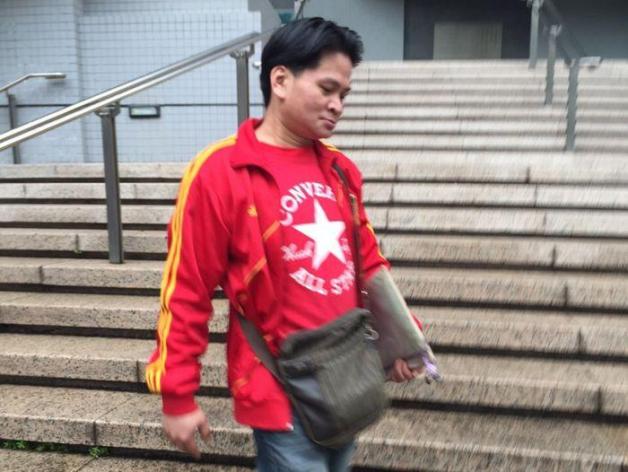
38-year-old unemployed male Shi
Kwok-hung was arrested early morning on December 1st when the police was
enforcing crowd control. Police officer Lee testified that the defendant ignored
police instructions and dashed out onto the roadway to yell: "I want genuine
universal suffrage." When Lee tried to arrest Shi, the latter struggled and Lee
summoned reinforcement.
According to the defendant, he was
at his home in Shek Lei Estate, Kwai Chung. But around midnight, his tooth was
aching and therefore he took a bus down to Mong Kok to buy some medicine.
The defendant's lawyer questioned
that Lee did not put down in his written report that the defendant had yelled "I
want genuine universal suffrage." He also said that another police officer told
Lee as the defendant was being brought inside the police van: "You haven't
gotten started today. You take care of this case!" Lee admitted that he was
negligent in not writing down the details of the case.
The magistrate said that Lee put
down in his written statement that he stretched both his hands out to block the
defendant from getting onto the roadway but Lee testified in court that he
grabbed the defendant. The testimony was inconsistent. Therefore, the magistrate
found the defendant not guilty.
(Apple
Daily) April 21, 2015; (Ming
Pao Canada, April 21, 2015)
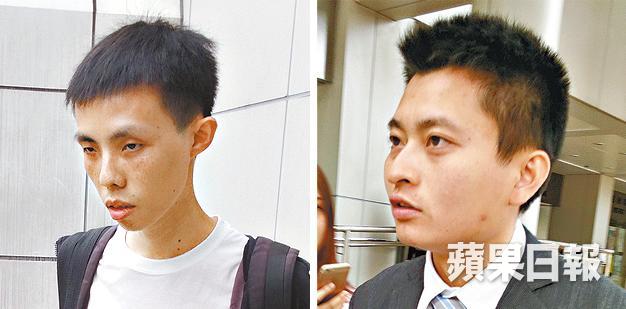
Defendant Lau Tsz-Kiu and police officer Lai Kai-tat
According to police officer Lai
Kai-tat, he led 37 police officers to go from Admiralty Centre towards
Government Headquarters at around 4pm on September 28. On the way, demonstrators
chanted: "This is our place. Your are not welcome." Near the gate into the
Legislative Council, about five or six individuals held hands and impeded their
progress. Lai asked them to yield to no effect. So Lai tried to squeeze in
between the gap. At that moment, 26-year-old defendant dim sum chef Lau
Tsz-Kiu rushed over and shoved both hands on his chest. Lai yelled: "You are
attacking a police officer!" The defendant turned around to flee. Lai chased him
for 15 meters and then the two struggled. Other policemen rushed over to help.
Other demonstrators rushed over to demand: "Release him." Lai was kicked. The
defendant was was surrounded by the police and taken away 15 minutes later. Lai
underwent a medical examination which documented a red mark on his chest and
scratch marks on his neck.
The defense showed the relevant
television news report, which showed that Legislative Councilor speaking to a
senior police inspector to identify the police officer who was attacked. The
police inspector made some inquiries but could not get a response. The defendant
told the reporters that at the time of the incident, he came across a large
number of policemen. He tried to retreat but the police accused him of attacking
a police officer.
(Oriental
Daily) April 21, 2015.
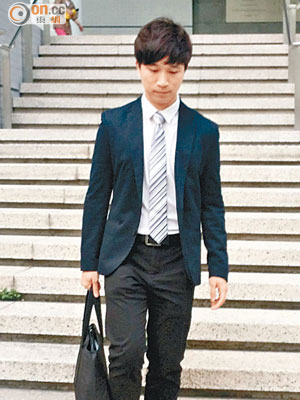
On January 25 at Sai Yeung Choi
Street South, Mong Kok, a 22-year-old male student Ho Chi-san was suspected of
instigating others to block an ambulance from leaving. When the police
approached to arrest him, Ho turned around to leave. Ho was arrested later. At
the Kowloon City Courts, the magistrate decided that the video showed that when
Ho left, the police had not reached him yet. Therefore, there is some doubt in
the testimony and therefore Ho was found not guilty.
(Post
852) April 20, 2015.
According to combined reports,
22-year-old student Ho Chi-san was said to have tried to stop an ambulance from
leaving, yelling "Black Police" and calling on others not to disperse. When he
was about to be arrested, he turned around and fled. Therefore, he was charged
with "resisting a police officer." The magistrate questioned what the police
were doing at the time. The prosecutor said that the police was clearing
obstacles from the street and the defendant refused to leave the roadway.
Therefore, it was "passive resistance."
Based upon the video, the
magistrate said that Ho Chi-san had already left. This was inconsistent with the
testimony of the police. Therefore, the magistrate decided that the testimony of
the police officer was not credible and found the defendant not guilty.
(Apple
Daily) April 21, 2015.
The prosecutor alleged that Ho
Chi-san obstructed the ambulance and chanted "Ignore the Black Police" and "I
don't believe that they can arrest me" to incite others to block the road. The
magistrate questioned whether such actions constitute resisting the police. He
asked the prosecutor "What is resistance?" The prosecutor replied the action was
"passive resistance."
The police officer testified that
when he stretched out his hand to arrest Ho, the latter turned and left.
Therefore, this becomes the crime of resisting the police. The magistrate said
that he could see that Ho had left before the police acted. This was
inconsistent with the testimony of the police. Therefore, he found the defendant
not guilty.
(Sing
Tao) April 14, 2015.
According to the testimony of
police sergeant Lam Ho-ming, he felt being hit on his right shoulder. When he
turned around, he saw police officer Tsui Wai-yip arresting the defendant Wong
Chi-kai. The defense elicited from Lam that he was not actually injured because
no signs of injury were detected during the medical examination.
(Oriental
Daily) April 21, 2015. On January 25, a 35-year-old
unemployed man named Wong Chi-kai was charged with hitting the right shoulder of
a police sergeant. The magistrate accepted the testimony of the police sergeant
and found Wong guilty. Wong was fined $2,000.
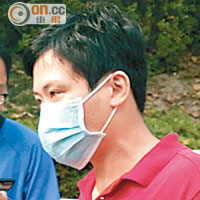
(Post
852) April 20, 2015. 35-year-old Wong Chi-kai was
charged with slapping police sergeant Lam Ho-ming on the right shoulder and
therefore charged with attacking a police officer. Sergeant Lam said that he did
not see his attacker. But the magistrate found the testimony of another police
officer to be credible, and found Wong guilty. Wong was fined $2,000.
(Oriental
Daily) February 15, 2015. Wong chi-kai is embroiled in
another more serious case. Among the 6 persons arrested in Shatin on February 15
2015 was a 35-year-old
unemployed man named Wong. He was charged with assaulting a police officer by
pulling her hair from behind. Wong was already out on bail for another incident
during a Mong Kok demonstration in January.
The evidence?
https://www.youtube.com/watch?v=cBM2AYkbJSo At 1:05, someone reaches over
and pulls the hair of the female plainclothes police officer. This is replayed
in slow motion at 1:18.
There is another video earlier on
that day in Sha Tin:
https://www.youtube.com/watch?v=dTezhK_UM3w
in which Wong Chi-kai is almost certainly not in the right state of mind.
However, Wong is not being charged with drug abuse at this time.
Another compilation of the two
videos:
https://www.youtube.com/watch?v=jRZ4TDajp8U
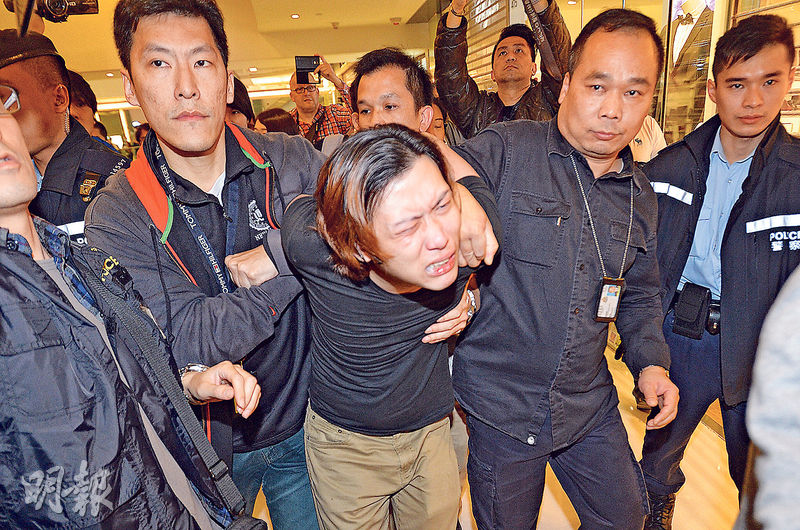
(Oriental
Daily) June 8, 2015.
35-year-old unemployed man Wong
Chi-kai was sentenced to 2 months in prison at Sha Tin Court today. He was out
on $2,000 bail pending appeal. According to the probation officer, the defendant
refused to admit to wrongful doing and his answers came only after repeated
prompting ("squeezed out slowly"). The defendant has bad habits (which usually
means drug abuse) and lacks self-control. Therefore the probation officer did
not recommend community service because he would be a bad influence on those he
encounters. The defense claimed that the defendant is contrite and even though
he mixes with drug user friends, he is paying his credit card debt on his own.
The magistrate said that the
defendant openly defied the law. After the female police inspector told him to
stop harassing a mainland tourist, he went back and pulled her hair from behind.
The magistrate did not think that the defendant acted in a heated moment. The
magistrate said that the public must be given the message that assaulting police
officers on duty will not be tolerated. Since the defendant had previously been
fined in April for attacking a police officer already, the starting point of the
penalty of this other crime should be 3 months in prison. However, since the
defendant pleaded guilty as charged, the magistrate gave him 2 months in prison.
(Wen
Wei Po) June 9, 2015.
With respect to the case of the
assault of the female police inspector, she was unable to immediately identify
who pulled her hair from behind. Later the police checked the videos and then
arrested Wong at 6pm. After being warned about self-incrimination, Wong
nevertheless admitted that he had already consumed six cans of beer that
afternoon and therefore committed the deed out of anger.
(Ming
Pao) June 9, 2015.
The female police inspector
observed that some demonstrators surrounding a mainland tourist towing a
suitcase. So she instructed the police sergeant to escort the tourist away. The
defendant approached the mainland tourist and used foul language to accuse him
of being a parallel trader and demand that he should go back to the mainland. The
defendant kicked the suitcase and pushed the tourist.
At this point, the female police
inspector went up to stop the defendant, who demanded to know: "Are you a madam
(=police woman)?" The female police inspector showed him her ID. Shortly
afterwards, the defendant pulled her hair from behind. The female police
inspector turned around and asked who pulled her hair. None of the dozen
photojournalists who saw the action said anything. The police arrested the
defendant later that day at 6pm.
(Oriental
Daily) December 1, 2015.
Previously Wong Chi-kai had
pleaded guilty and was sentenced to 2 months in jail. He posted bail pending
appeal.
Yesterday at the the appeal
courts, the defense lawyer argued that Wong was drunk at the time. The
magistrate said that being under the influence of alcohol is not a reason for
reducing the sentence in as much as loss of control due to intoxication does not mitigate vehicular
homicide via drunk driving.
The defense lawyer also argued
that the defendant acted in a moment of rashness. The magistrate demurred,
because the defendant asked the victim whether she was a police officer, backed
up and came back a minute later to pull her hair from behind. The magistrate was
"sneaky" and said: "Why don't you hit the police officer from in front?" and "If
the whole world acts like him, it would be chaos."
However, the magistrate brought up
the fact that the defendant was charged with assaulting a police officer in
January 2015. This took place before the current sentencing was made and the
original magistrate considered that the defendant was a recidivist. The defense
lawyer said that since that other case was not final, it should not have
counted. The prosecutor said that the two cases took place close in time and
should be taken into consideration. In any case, the magistrate reduced the
sentence from two months to six weeks in jail.

(Wen
Wei Po) April 25, 2015.
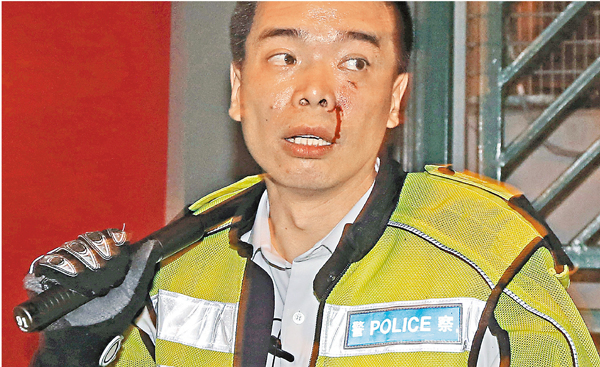
Injured traffic police superintendent Au Wing-leung.
29-year-old telecommunications
technician Won Wei-tia was charged with throwing a water bottle at a traffic
police superintendent on November 29 outside the Macpherson Playground (Mong Kok),
causing an injury to the left side of the face. The defendant was trailed by
other police officers and arrested one hour later.
Yesterday, the magistrate said
that the testimonies of the superintendent Au Wing-leung and the plainclothes
policeman Yeung Lap-wai who witnessed the incident were credible. Although Au
did not see his attacker, Yeung's testimony matched the physical evidence.
Therefore, he judged that Won was guilty of assault against Au.
The defense questioned why Yeung
did not make an arrest immediately. The magistrate ruled that this was an
"unreasonable and impractical demand" because Yeung was not equipped to make an
immediate arrest. Instead, Yeung follow the police guidelines to trail Won and
eventually summoned equipped colleagues to make the arrest.
In another case, 34-year-old
part-time interior decoration worker Cheung Hon-wai was spotted by a citizen to
kick a dent in a police vehicle. The individual was arrested. After being
cautioned about his rights, the individual said that he had no idea why he
kicked the police vehicle. The magistrate asked the prosecutor to present the
photo of the damaged police vehicle. He looked at it and said: "Wow, such a huge
hole!" Upon detailed examination, he said: "Or could this just be dirt?" The
prosecutor helped him by pointing out the dent next to the grime.

(Oriental
Daily) April 21, 2015.
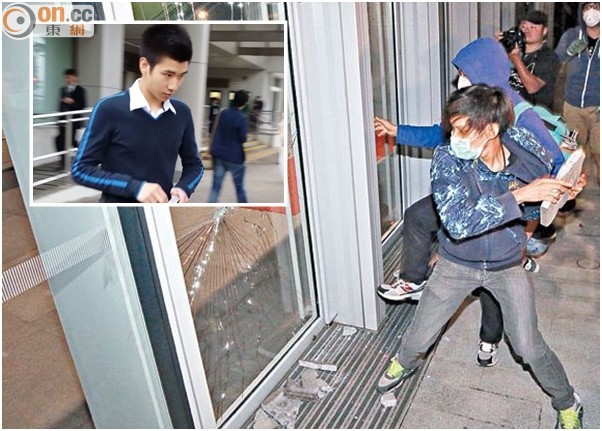
On November 19, 2014, 19-year-old
Yuen Tsz-fung was suspected of attacking a police officer by ramming his shield
and hitting his person. The defense pleaded that the defendant is still only
19-years-old, has no prior criminal record, works as a sales representative, has
completely learned his lesson and is ready to bear all the consequences. The
magistrate said that the court is obliged to protect the police in their line of
duty. In consideration of the defendant's age and his past record, the
magistrate sentenced Yuen to 12 months of probation during which he must not
attend any unlawful assembly or demonstration, or make incite unlawful actions
on social media. Yuen must also stick to a curfew and follow the instructions of
the probation officer in order to rehabilitate himself.
(RTHK)
April 21, 2015.
A 19-year-old man was placed on probation
for a year by Eastern Court on Tuesday for attacking a police officer during
the Occupy protests last year. The probation order also banned Yuen Tsz-fung
from taking part in any illegal rally and uploading anything provocative on
social media. A 9pm-to-6am curfew order was also imposed on him.
Magistrate Lee Siu-ho said it was
unacceptable for Mr Yuen to assault the officer when protesters tried to
storm the Legislative Council building in November. But Mr Lee accepted the
probation officer's recommendation to give Mr Yuen a second chance as he was
young and a first-time offender.
(Apple
Daily) April 21, 2015.
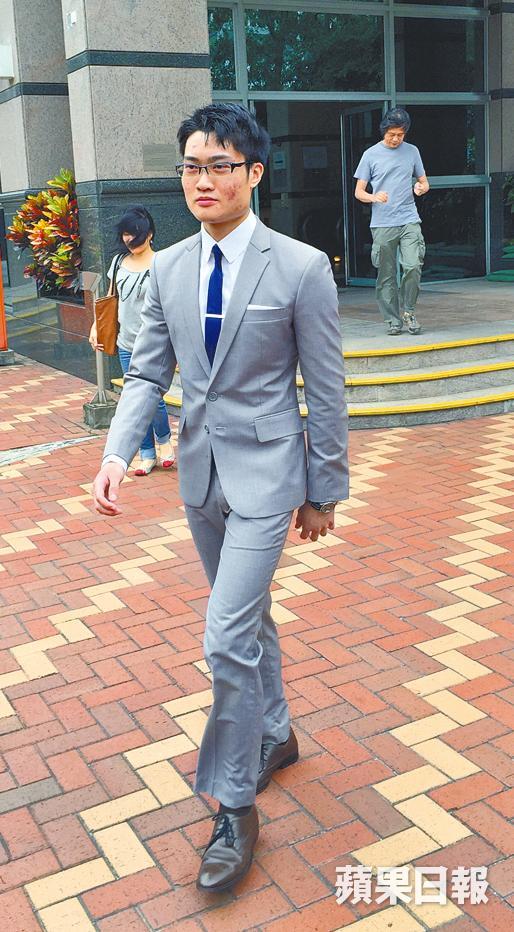
A Lingnan University student Yueng
Ho-yee sprayed "Reclaim Sheung Shui" in black paint on a wall near the Sheung
Shui MTR station at around 3am on January 11 2015. An off-duty policeman spotted
him along the way, and thought that Yeung was suspicious-looking with a spray
can in hand. Therefore, the policeman followed him quietly to observe from about
15 meters away. After Yeung sprayed the words, the policeman approached to
identify himself. Yeung fled. During the ensuing struggle, Yeung hit the
policeman on the left side of the face with his right fist.
According to the senior barrister
representing the defendant, Yeung is the only son. His father is a
telecommunications technician at a large media company. The defendant had been
upset at the inconvenience to the local residents by the parallel traders and
therefore committed the crime. However, the defendant now realizes that "there
are many ways of expressing oneself. Without addressing the issue of whether the
government has done anything to help the Sheung Shui residents live quiet lives,
the defendant now realizes that his method of expression was wrong."
Furthermore, the senior barrister said that there was no premeditation to
assault the police officer. When the police officer stopped him, he panicked and
committed the assault. At the time, the defendant only wanted to flee, not to
commit assault. Besides the injury to the policeman was minor.
The magistrate said that
assaulting a police officer is a serious crime which incurs severe penalties.
However, he agreed that the defendant only threw one quick blow while trying to
flee, causing a minor injury. Sentencing was scheduled for May 5th. The
magistrate also fined the defendant $1,000 towards restoring the wall outside
the MTR station. The magistrate said: "I hope that this comes out of your
allowance money, because I don't want to fine your parents."

(Sing
Tao)
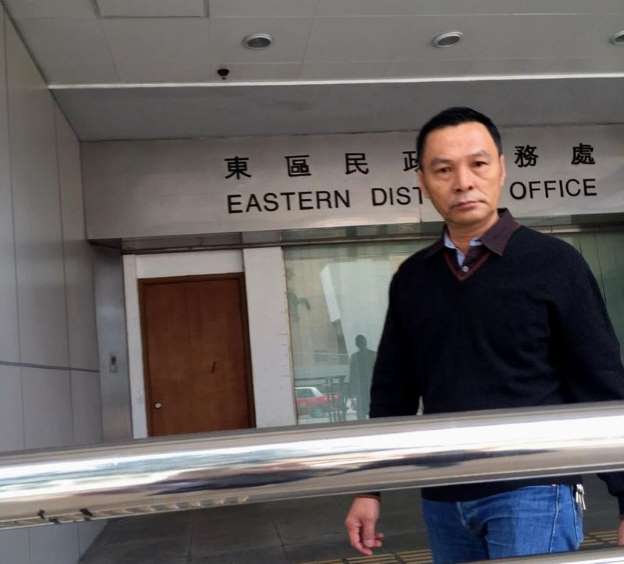
According to the 67-year-old
victim Lo Tai-wai, he was upset at the Occupy Movement students for blocking
the road and hindering his livelihood as a chauffeur. He said that the
police have been very restrained in their actions, and he fully accepts the
use of tear gas. He also said that he has been suffering from mental
depression since the 2003 SARS episode, and he is under medication. On
January 6, 2015, the victim came to the Li Ka-shing School of Medicine at
Hong Kong University and began yelling: "Benny Tai, Joshua Wong, shit-eating
dogs, pay back" to the annoyance of the faculty and students.
The defendant 58-year-old
janitor Chan Chung-shui was working at the School of Medicine. Chan said
that Chan used foul language at everyone that he saw and asked them to pay
back the money. Lo encroached on Chan and said, "I can even beat you." Chan
used his finger to point at the corner of Lo's eye. Lo was scared, and
therefore used his hands to push Chan.
The charge against Chan was
that he hit Lo on the left side of the cheek, such that six stitches were
required. The magistrate determined that the charge was supported by the
evidence presented. Sentencing will be held later.

(YouTube)
The battle between Kwok Yee-wah and Leung Kwok-hung at the City Forum on June
6, 2014.
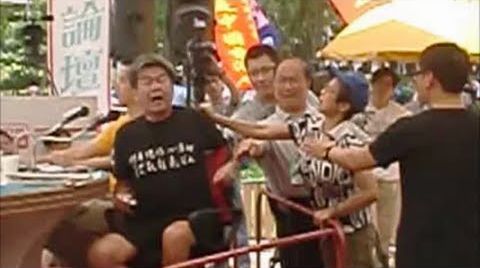
0:38 A man Fu Chun-chung of
Defend Hong Kong Movement presents some pomelo leaves to Leung Kwok-hung
(note: pomelo leaves are infused in water and used to cleanse bad
luck/influence from those who just got out of jail as an exorcism ritual).
1:10 Kwok Yee-wah approached Leung from the rear and wagged her finger as
she harangued him.
1:12 Leung countered by poking Kwok in the face.
1:38 Kwok countered by two slaps on Leung's back
2:30 Kwok came back later with another punch to the back.
(Sing
Tao) February 3, 2015.
At the City Forum on June 6,
2014, Legislative Councilor Leung Kwok-hung was alleged to have been slapped
Defend Hong Kong Movement member Kwok Yee-wah on the back as well as called
a "jailbird." In return, Leung was alleged to have slapped her in the face,
which resulted in a common assault charge. The two cases were originally
scheduled to be tried together, but the defense petitioned the cases to be
tried separately.
(Sing
Tao) April 15, 2015.
At Eastern Court yesterday,
the magistrate determined that the charge against Kwok Yee-wah was supported
by the evidence presented. The defendant claimed that she only wanted to
give the pomelo leaves to Leung Kwok-hung as a present "in order to wash
away the odor of the prison." She denied having intentionally slapped Leung
on the back. She said that she learned from watching television that Leung
has the habit of assaulting people.
(Oriental
Daily) April 16, 2015.
The prosecutor said that the
defendant Kwok Yee-wah was neither friend nor relative to Leung Kwok-hung.
But on the day of the incident, she wiped his body with pomelo leaves and
cursed him out as a
"damned jailbird", which led to chaos and the counter-attack from Leung
Kwok-hung. The defense said that "jailbird" is an regular term for daily
usage. Although the term has negative connotations, it is apt in this case
because Leung had just gotten out of jail. Kwok was only stating a fact and
freedom of expression is protected in Hong Kong. The defense also said that
Kwok waved the pomelo leaves only after being poked in the eye by Leung. She
did not intend to attack herself.
(Wen
Wei Po) April 22, 2015.
Defend Hong Kong Movement
60-year-old female member Kwok Yee-wah was accused of attacking Legislative
Councilor Leung Kwok-hung at the City Forum on July 6 2014. She also waved
pomelo tree leaves and called him a "damned jailbird." On April 22, Kwok was
found guilty of common assault and fined $3,000. She was found not guilty of
disturbing public order. The magistrate emphasized that the defendant had
publicly insulted Leung. Even though that is not a crime, society definitely
does not approve and therefore he deplores her action.
(Metro)
April 25, 2015.
A hearing on the case of Leung
Kwok-hung assaulting Kwok Yee-wah was held today in Eastern Court. The
magistrate questioned why the same incident resulted in a charge of common
assault against Leung Kwok-hung and a charge of public disorderly conduct
against Kwok Yee-wah. Leung expressed his disappointment that the Justice
Department would distort the cases. The magistrate told Leung to seek legal
advice. Another hearing will be held later.
(Oriental
Daily) May 28, 2015.
At Eastern Court today, Leung
Kwok-hung was found guilty of common assault against Kwok Yee-wah. The
prosecutor summoned a security guard to testify. The witness said that he
tried to separate the two, but Leung did push Kwok once on the face and Kwok
hit back and struck Leung on the shoulder. The prosecutor also played the
video of the incident. Leung did not appear in court. His lawyer said that
Leung was only acting reflexively and never intended to assault with
malicious intent.
(RTHK)
June 8, 2015.
Today the magistrate ruled
that Kwok Yee-wah was threatening Leung Kwok-hung from a close distance at
the time. Since Leung was seated on stage, he did not have room to retreat.
Therefore the magistrate could not exclude the possibility that Leung pushed
Kwok to prevent her from getting closer. Although Leung's push was quite
powerful, the magistrate is not 100% certain that he had malicious intent.
Since Kwok is female, the charge would have been more serious if contact was
made below her head. The magistrate said that although Leung did not have to
push, it was up to the prosecutor to make his case and the reasonable doubts
are on the side of the defendant.
(Wen
Wei Po) August 7, 2015.
The prosecution said that
Leung Kwok-hung pushed the face of Kwok Yee-wah who did not have any actual
physical contact with him. Therefore, this was a disproportionate use of
force. If the court accepts Leung's claim, then this becomes a precedent for
all such similar cases. Meanwhile the defense claimed that when Kwok Yee-wah
got up and approached Leung, the two were in close proximity and therefore
Kwok's actions became unpredictable. Therefore it was reasonable for Leung
to instinctively put his hand forward. The magistrate found Leung guilty and
fined him $3,000. Outside the courtroom, Leung said that he was engaged in
self-defense and the whole case was political persecution.
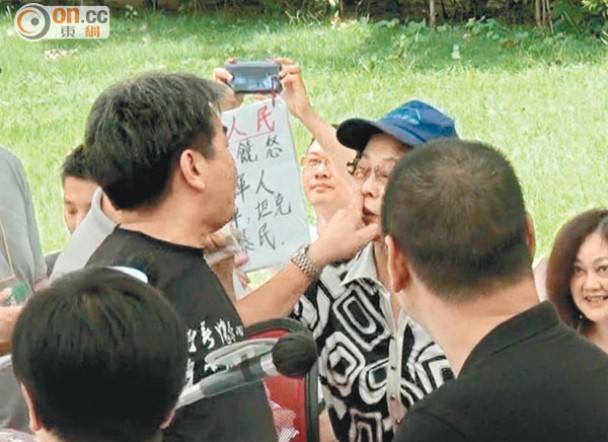
(Oriental
Daily) December 29, 2015.
According to Leung Kwok-hung's
lawyer, the original magistrate correctly determined that Kwok Yee-wah's
actions were provocative. Therefore, Leung was only defending himself. But
in the appeal hearing, the magistrate wrong determined that Leung had no
reason to use force. Leung's lawyer insisted that Leung felt genuinely in
danger and used appropriate force to defend himself. The high court judge
accepted that Kwok was provocative and Leung was defending himself. However,
the incident was filmed and the judge has watched the film many times.
He said that it would be appropriate force if Leung blocked Kwok's hand, but
Leung in fact poked his finger into Kwok's face. Therefore, Leung was not
defending himself; he was making an active offense.
Leung's lawyer said that the
judge needs to look at things from Leung's viewpoint. When Leung
noticed Kwok, she was charging forward. That was just one or two seconds
before Leung took action. Instinctively, Leung responded. Therefore this was
not unnecessary force. But the prosecutor said that Kwok was an old lady who
only wanted to come up and scold Leung. Therefore, Leung action was not
justified self-defense.
(Oriental
Daily) February 3, 2016.
Today the High Court rejected
Leung Kwok-hung's appeal. The judge said that Leung genuine believed that he
needed to defend himself in the face of Kwok's harangue. The prosecution and
the defense agree on this point. But the problem is that Leung used
unreasonable force. At the time, Kwok was only scolding Leung. She did not
attack or charge forward. Leung turned out, took a look at Kwok and then
waited for one or two seconds before poking Kwok's face with his left index
finger. Leung's action was not instinctive. This was clearly intentional and
also unreasonable force. The High Court therefore upheld the original
verdict.
Leung Kwok-hung said that he
will discuss with his lawyers whether to appeal further to the Final Court
of Appeals. However, the fees will be very expensive. He said that the Chief
Executive, Chief Secretary and others have security guards with them, but he
doesn't have any. Therefore Leung has been approached by many people to
curse him but the court doesn't appreciate that he has such problems.

(Apple
Daily) April 28, 2015.
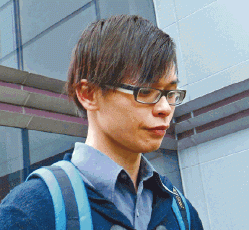
According to police officer
Wong Lok-on, he was called to Nelson Street, Mong Kok at around 2am on
October 12. He observed about 200 demonstrators facing off 30 police
officers. At the time, the demonstrators were yelling and pushing at the
police. Wong raised both his hands and went into a crowd. The 32-year-old
audio equipment technician Won Yuen-kuen complained that Wong had bumped
into him. Won used his right foot to kick Wong's left foot. Wong yelled
"Assaulting a policeman" and Won was subdued by other police officers.
In defense, Won said that Wong
ignored his complaints about being bumped and refused to apologize.
Therefore he was emotionally excited. Then Wong yelled "Assaulting a
policeman" and Won was subdued by other police officers.
The magistrate determined that
Wong was indeed kicked once. Judging from the position and distance, only
Won could have kicked him. However, it is possible that the kick came
because Won lost his balance. The reasonable doubt is to the benefit of the
defendant, who was then found not guilty.
(Oriental
Daily) April 27, 2015.
Police officer Wong said that
at the time of the incident he was one foot away from the defendant. The
defendant accused the officer of bumping into him, but Wong said he did not
and therefore ignored the defendant. Then Wong felt being kicked in the left
foot. Since only the defendant was close to him, he thought that the
defendant must have kicked him. Therefore he yelled "Assaulting a policeman"
and his colleagues arrested the defendant. Afterwards, Wong went to the
hospital where his left foot was found to be slightly swollen. Wong took two
sick days.
The defendant defined kicking
the police officer. The video showed that someone pulled the defendant from
behind, causing him to lose his balance. Therefore, it cannot be excluded
that the defendant accidentally touched the officer. The magistrate said
that since the officer did not see the defendant kick him, there is a point
of doubt in the case and therefore it was not proven that the defendant
kicked the officer. The magistrate found the defendant not guilty.

(Sing
Tao) April 28, 2015.
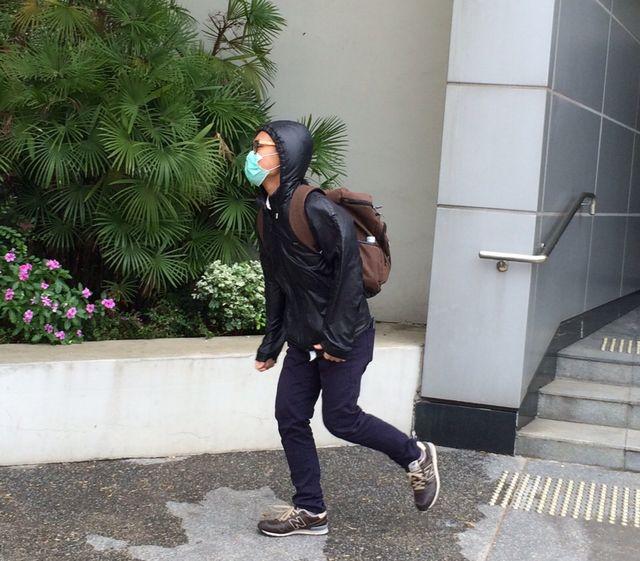
18-year-old DMHK News
photographer Chiu Chua-kwun claimed to be a student. He was charged with
possession of unlicensed radio communication equipment. At the time, he
claimed that he used the equipment because it was "fun and impressive." The
prosecutor asked that Chiu be sentenced to probation. The magistrate
professed perplexity as to why probation was necessary. He said that the
defendant was only charged with the possession of an unlicensed object.
However, the prosecutor said that he had already obtained legal opinion. So
the magistrate told the defendant "Now you know that this is not fun and not
impressive" and sentenced him to 6 months probation with a $300 bond.
70-something-year-old Ho
Kwei-seng said that he was on the way home when demonstrators blocked his
path. They hit him with their banners and cursed him out: "Damn old ghoul!
Why are you in Hong Kong? Go back to China!" Ho was found guilty of
fighting in a public and fined $1,000.
One defendant was charged with
possession of a weapon of assault. The defendant that he carried a cutter
knife for job-related reasons. The magistrate accepted the explanation and
and the charge was withdrawn. Another defendant was charged with misleading
the police about being assaulted. According to the video, the defendant had
physical contact with other persons and may indeed think that he was
attacked. Therefore the charge was withdrawn.
https://www.youtube.com/watch?v=73BfVqgnAxE

(Commercial
Radio) April 29, 215.
Two years ago, at a
District Council consultation, League of Social Democrats secretary-general
Chan Tak-cheung threw a chicken egg at the stage and hit Secretary of
Finance John Tsang on the forehead.
https://www.youtube.com/watch?v=VCB7We2HC7E
. At his first trial, Chan said that he had intended to throw the egg either
on the ground or over the heads of the government officials on the stage,
but he missed. He was found guilty and he appealed the verdict. The High
Court found this explanation to be implausible, and sentenced him to three
weeks in jail, to be carried out immediately. The High Court also considered
the fact that Chan has still not admitted to wrongdoing, and therefore the
court has to know that violent behavior will not be tolerated.

(Oriental
Daily) April 30, 2015.
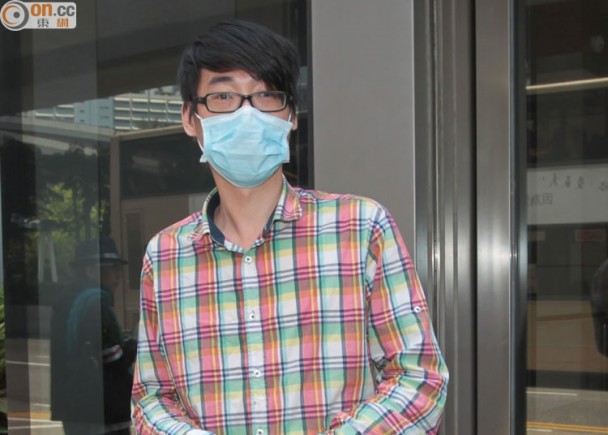
27-year-old delivery worker
Leung Chi-hang was charged with disorderly conduct in a public place. On the
night of October 17, the police withdrew in the face of numerous
demonstrators. The defendant was alleged to have led in chanting slogans
such as "Beat him to death!" and "Kill the cops!" He also incited others to
chant insulting slogans at the police. In addition, he was charged with
tossing two iron barricades outside London Restaurant (Nathan Road) onto the
roadway, almost injuring two policemen.
The prosecutor called the
police officer and the police sergeant who made the arrest to testify. They
identified Leung as the individual who led the slogan-chanting as well as
tossed the iron barricades outside London Restaurant.
The defendant said that he was
only a spectator and an observer on that night, that he did not chant any
slogans and that he did not touch any iron barricade. However, he did see a
woman tip an iron barricade. He questioned whether the police was making
baseless accusations.
The magistrate has ruled that
the evidence supports a guilty verdict. Sentencing will be made later.

(Oriental
Daily) May 1, 2015.
19-year-old maintenance worker
Au Yik-kit was charged with spraying a 3-meter-by-3-meter circle on the
eastbound lane of Hennessey Road in the Occupy Causeway Bay area. The police
told him to clean it up, but Au refused. The police arrested him and charged
him with criminal property damage. Yesterday, he pleaded not guilty in Eastern Court.
The trial will begin on June 2. In addition, Au was previously charged with
loitering and possession of an assault weapon previously in the Sheung Shui
arson case. That other case is scheduled to be tried on June 16.

(Apple
Daily) April 29, 2015.
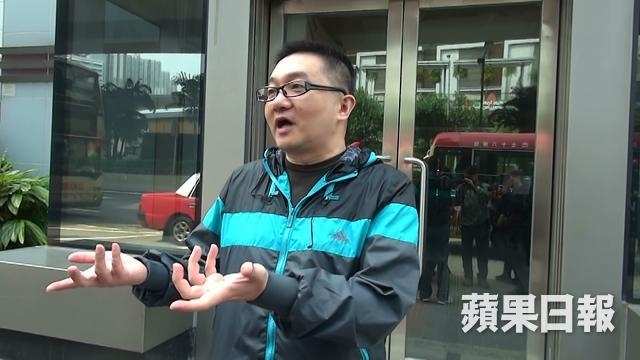
52-year-old unemployed man
Wong Hak-ken was charged with bringing two 4.5-liter water bottles to the
Occupy Mong Kok area and tossing one of them towards the Occupy
demonstrators on October 19. Previously Wong had pled guilty to disrupting
the public order for this action. On this particular day, Wong who has a
history of mental problems took eight medicinal pills and then went to
commit the act. As such, he clearly showed intention. The magistrate took
into consideration that Wong was mentally unstable at the time and has shown
contrition during his guilty plea. The sentence was four weeks in jail, but
suspended for three years.

(SCMP)
Protests hit Carrie Lam's neighborhood 'bus parade' to promote Hong Kong
electoral reform. April 25, 2015.
An open-top bus parade by officials seeking
to drum up support for the government's political reform package ended in
arrests and chaos yesterday as opponents made themselves heard along the
route.
The bus trip marked the start of a massive
publicity campaign intended to get the public behind the contentious plans
for the 2017 chief executive poll before lawmakers vote on it. But their
efforts received a blow earlier when the European Union said it supported
Hongkongers in their wish to have a "genuine choice" of candidates in 2017.
Thirty officials boarded the bus,
including Chief Secretary Carrie Lam Cheng Yuet-ngor, Financial Secretary John
Tsang Chun-wah and Secretary for Justice Rimsky Yuen Kwok-keung. They teamed up
to peddle the blueprint for reform officially announced on Wednesday, which they
hope will form the basis for the city electing its leader by universal suffrage
for the first time. Based on a framework set by Beijing, the package limits the
number of candidates to two or three, who will need majority support from a
1,200 strong nominating committee.
Pan-democrats say that amounts to political
screening and fake democracy, and have vowed to deny the plan a two-thirds
majority in the Legislative Council in June.
The bus made its first stop at Kennedy Town
in the afternoon - but sped off seconds after arrival amid clashes between
pro- and anti-government protesters and police. Three protesters were
arrested on suspicion of wounding police officers and interrupting them in
the course of their duties. The officials never stepped off the bus as they
continued to Kowloon and New Territories.
Lam, whose voice was largely drowned out
during the tour, said afterwards her team would continue to reach out to the
public to explain the reform plans. But the failure of the officials to
engage did not impress some. "I clearly saw them coming in and leaving like
rats in three seconds," said Jack Chan Hon-ting, 30, of Kennedy Town. "I
couldn't even see their faces clearly." In a joking reference to Leung's
comment on Wednesday that community outreach was an "easy job", Chan said
"he is right in this sense".
The Federation of Students, Scholarism and
radical groups such as the League of Social Democrats and People Power were
among the protesters.
(Apple
Daily) April 25, 2015.
Government officials took an
open-top double-decker bus to
tour three districts to promote the electoral reform. They did not have any
contact with citizens on the way. Scholarism convener appeared in Lok Fu in the
afternoon first. Then he hurried over to the Tai Po.
Wong told the media: "Under the
blazing sun, a group of senior citizens waited for three hours. The DAB as event
organizers did not pass out a single bottle of water to them. They were forced
to sit three hours as backdrop." Wong criticized the senior government officials
for refusing to make contact with citizens, both supporters and opponents.
Just at that moment, the
government bus passed by. Wong wanted to rush over to petition, but a
plainclothes policeman grabbed him and he fell. There was chaos at the scene.
Afterwards, Wong said that he only wanted to go to the roadside to chant slogans
at Carrie Lam. He was grabbed and he fell. He criticized the police for using
violence.
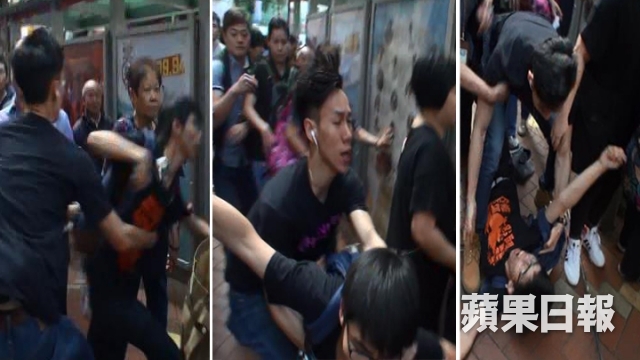
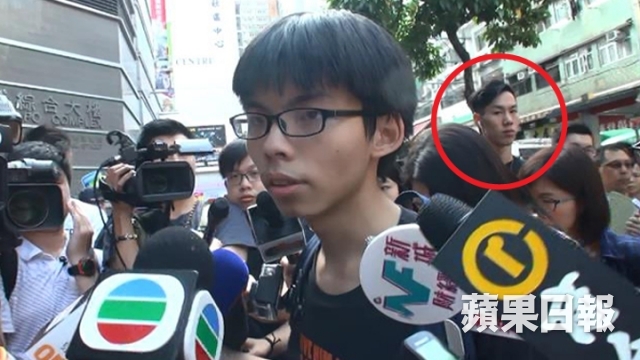
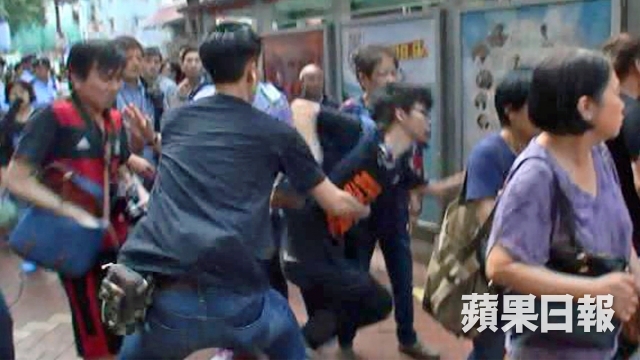
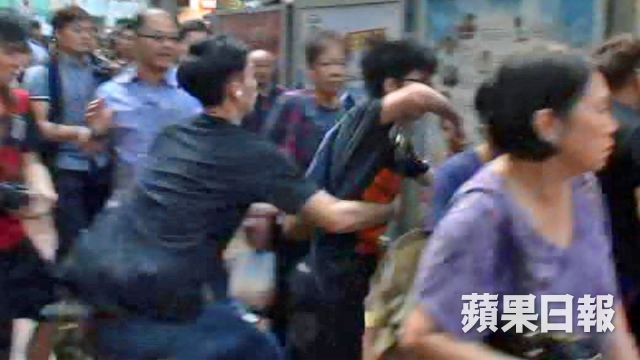
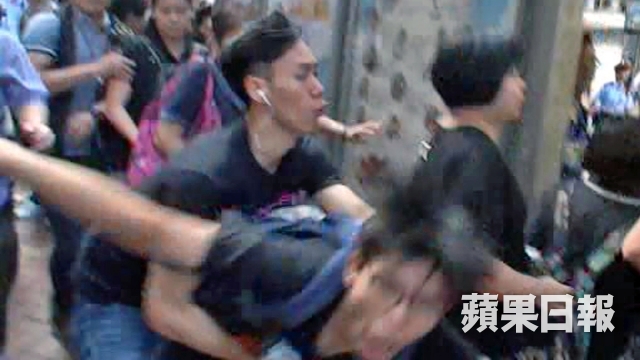
(Ming
Pao) April 26, 2015.
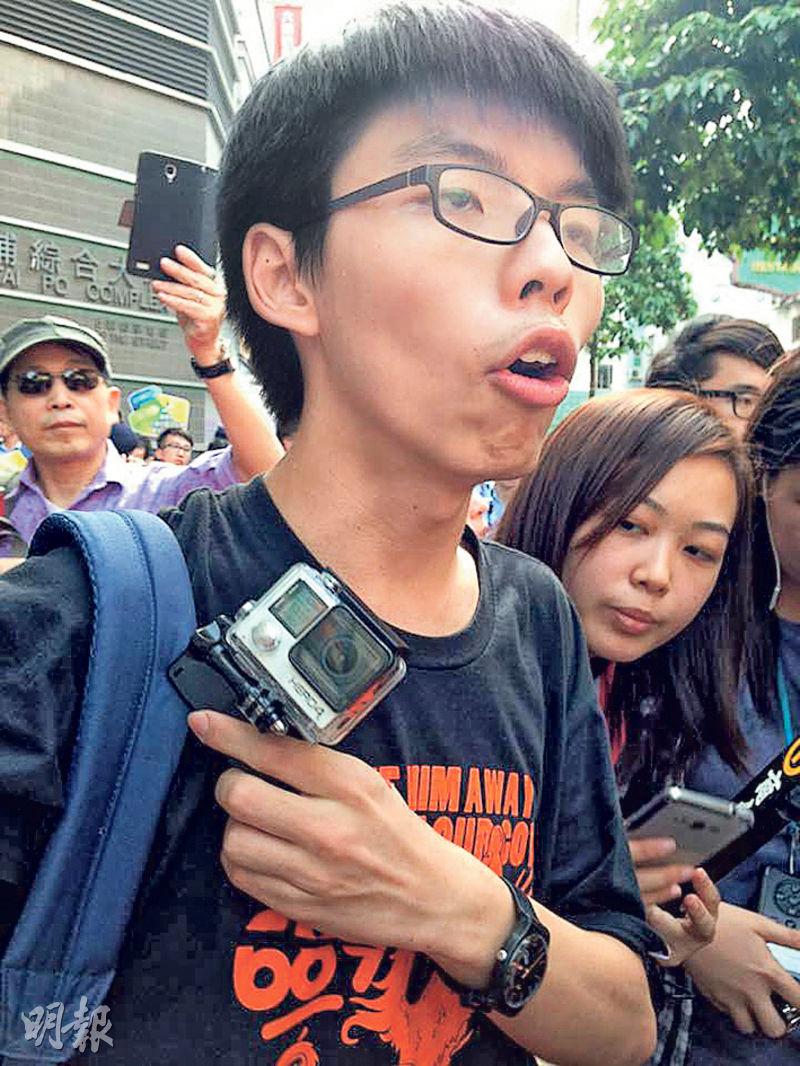
Joshua Wong and his GoPro Hero4 camera
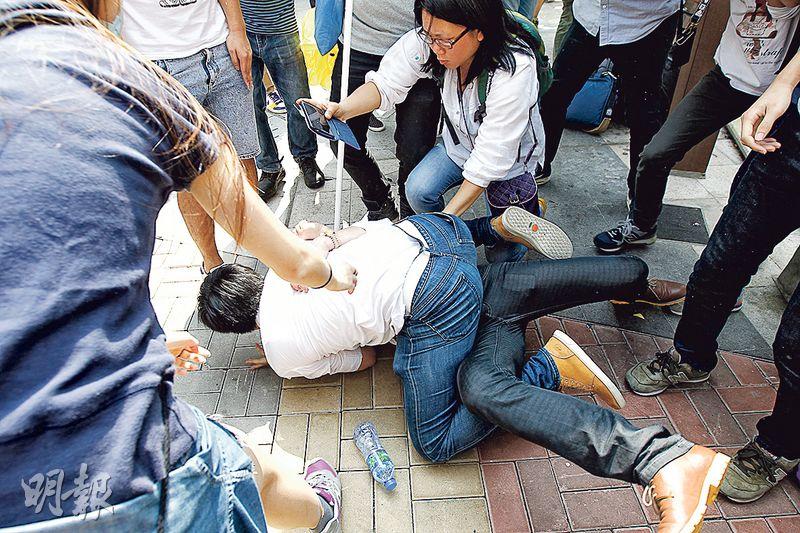
Student demonstrator piling on top of plainclothes
policeman. Another demonstrator is fully occupied with filming.
Members of the Democratic Party,
Labour Party and Civic Party could not be found in Tai Po, Kennedy Town or Lok
Fu yesterday. According to an unnamed pan-democrat Legislative Councilor, they
have their own event today and therefore they didn't have to show up yesterday.
Besides, the pan-democrats do not normally launch ambush attacks on government
officials. As to whether the pan-democrats were deliberately avoiding to be
identified with the radical elements, this pan-democrat Legislative Councilor said
that the citizens are smart enough to tell the difference between the two.
(Wen
Wei Po) April 26, 2015.
Yesterday, government officials
took an open-top double-decker bus around Hong Kong to promote the electoral
reform proposal. At the first stop in Kennedy Town, League of Social Democrats
chairman Leung Kwok-hung, People Power member Tam Tak-chi, Federation of
Students members, and regular demonstrator
Captain America showed
up. Leung and Tam used megaphones to try to out-shout counter-demonstrators
while Captain America waved the British colonial flag in support of Hong Kong
independence (that is, he believes that Hong Kong needs to be returned by China
to the United Kingdom first, and then the United Kingdom can grant independence
to Hong Kong).
The government bus came by at
2:45pm. The demonstrators attempted to rush onto the roadway. But the police
stopped them. There were at least two rounds of clashes, as people pushed and
shoved, stepped onto the flowerbeds and charged into the roadways. A foreigner
pedestrian jumped to demand the police to cease and desist. The police raised
the yellow warning banner.
According to the police, a
22-year-old man named Ng tugged at the police identification card of a
plainclothes policeman and another 27-year-old man named Ip pushed the
plainclothes policeman onto the ground. When the police attempted to stop Ip, a
39-year-old woman named Leung interfered. These three individuals were arrested
on suspicion of assaulting a police officer and/or obstructing the police in the
line of duty. The plainclothes policeman sustained injuries on his hand and
hands.
The government buss arrived in Lok
Fu at 3:30pm. Several dozen League of Social Democrats, Scholarism and Hong Kong
University Student Union members demonstrated outside the MTR station. When the
bus arrived, the demonstrators tossed ripped-up copies of promotional leaflets
as well as
Hell Money. The demonstrators were unsuccessful in trying to reach the
bus due to congestion.
The bus went by the Tai Po Complex
at 410pm. Demonstrators raised yellow umbrellas and some of them charged onto
the roadway in the direction of the bus. It was a dangerous situation.
Demonstrators and counter-demonstrators cursed and shoved at each other. The
police set up a human chain to separate the two sides. Some pro-government
supporters shouted: "Tai Po does not welcome you people!"
When the bus came by the scene
again, Joshua Wong was in the middle of an interview. He turned around and tried
to dash onto the road. The police tried to stop him. Wong fell down on the road
and stayed there for a while pretending as he was "dead." He claimed that he was
"pushed down" by the police.
(Oriental
Daily) April 25, 2015.
At around 3pm, the government
promotional bus arrived at Kennedy Town. The government officials sat in the bus
and called for citizens to support the electoral reform. Their supporters
chanted : "Universal suffrage for Chief Executive in 2017" and "Popular election
of Chief Executive" while waving placards and banners. Meanwhile the
demonstrators were shocked that the government officials did not come off the
bus. So some of them ripped up promotional materials and tossed them towards
the bus. This left the demonstrators with no choice but to try to chase the bus
at various stops. Finally in Tai Po, Joshua Wong chased the bus to Tai Po. But
as he rushed towards the bus, he fell down with face on the ground and one shoe
off. It was very awkward. The proceedings stopped before 530pm. The
demonstrators said that they will block the government officials anytime that
they show up in local communities in order to stop the government's promotional
campaign.
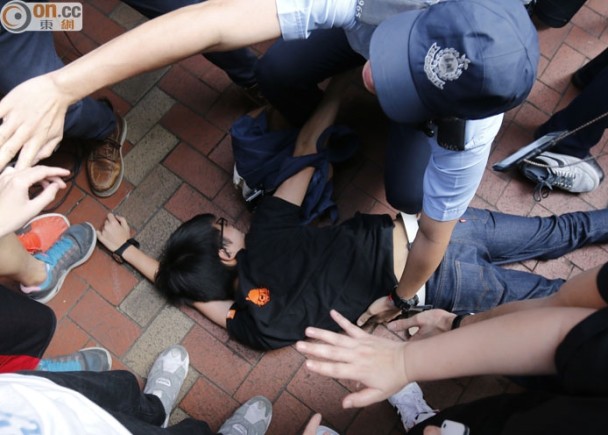
(Oriental
Daily,
Oriental Daily,
Oriental Daily)
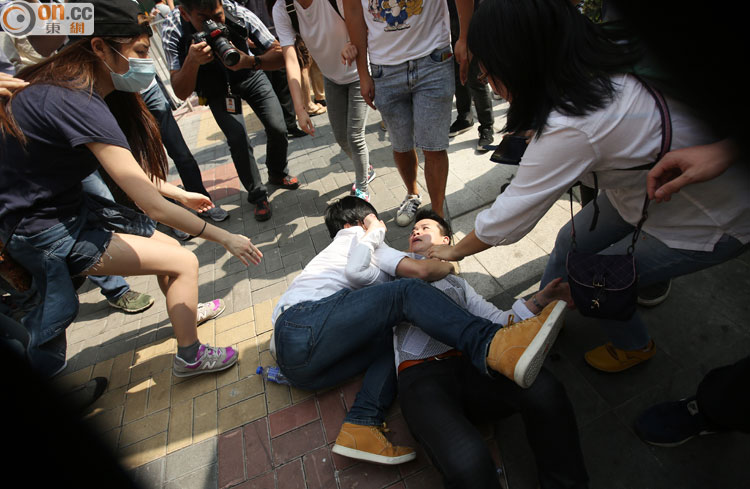
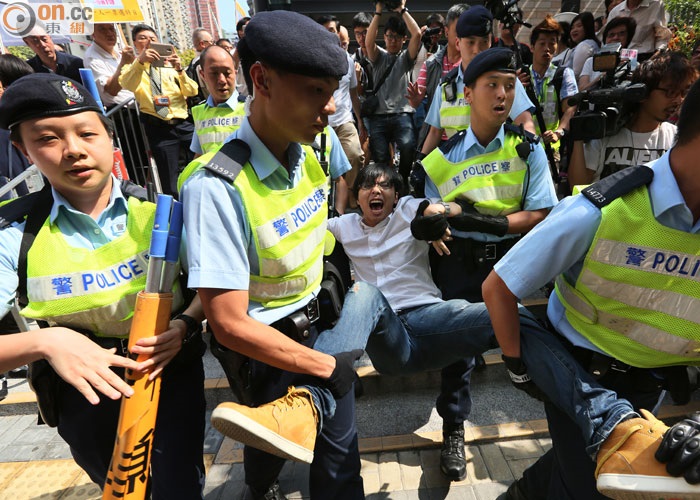
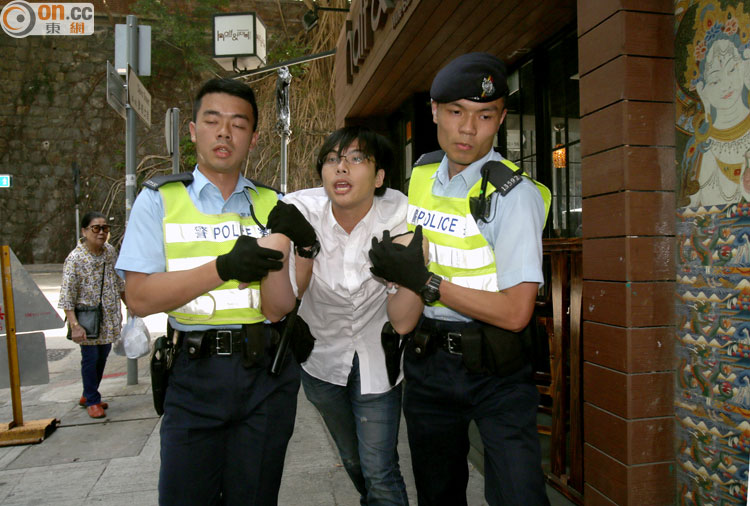
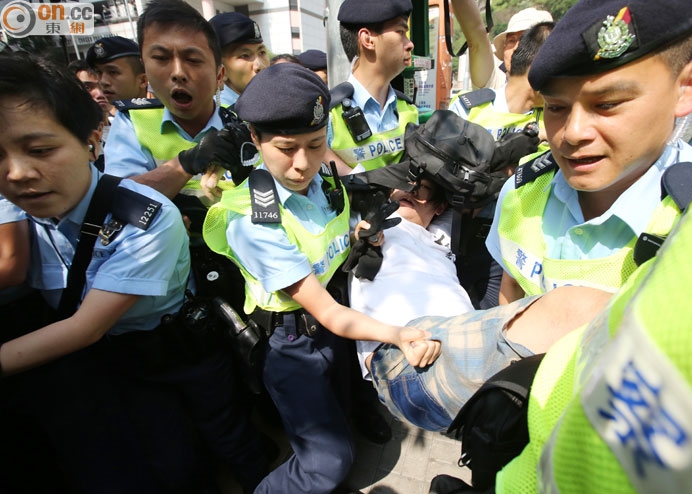
More than 100 demonstrators met
the government officials in Kennedy Town. At least 3 persons were arrested.
According to information, one of the arrestees was Occupy veteran Ah Sam.
Another was a female People Power supporter named Leung. According to City
University Student Union vice-president for external affairs named Leung, one of
their students was arrested. Leung criticized the police for arresting people
during the physical pushing and shoving without offering any explanation for the
arrests. He thought that the government officials because they did not get off
the bus and therefore were insincere. He said that the government did not
provide a suitable site for the citizens to express their demands. Leung was
also present to demonstrate against the Chief Executive on the day before.
Videos:
(Cable TV with additional footage
of greyhound racing from SaluteToHKPolice)
https://www.youtube.com/watch?v=zCpKoaAvdRA
(Truth Media Hong Kong)
https://www.youtube.com/watch?v=1u6d8hQtFY8
(DBC)
https://www.youtube.com/watch?v=3ZeeE5i_1as Wong sat on the ground, and
refused to answer the repeated single question from the uniformed police
officer, "Mister, are you injured?"
(Apple Daily)
https://www.youtube.com/watch?v=A5mY0KDUGSQ At 0:05, Wong turns away from
the press and sprints away; at 0:07, a tall plainclothes person (in black
clothes but with a white earplug) grabs Wong's waist. At 0:10, Wong is down on
the ground. Was this a tackle? Was this a dive? Will you issue a red card?
Internet comments:
- Hong Kong's Little Red Guard
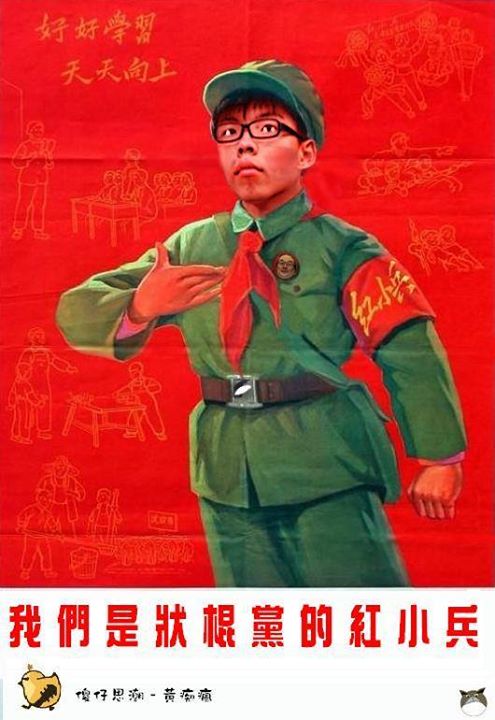
- I wonder how many newspaper will
have "Joshua Wong puk gai" as the headline story tomorrow? (Wikipedia)
Puk gai literally means "falling onto street" which is a common curse
phrase in Cantonese that may be translated into English as "drop dead." It is
sometimes used as a noun to refer to an annoying person that roughly means a
"prick." The phrase can also be used in daily life under a variety of situations
to express annoyance, disgrace or other emotions.
- Puk gai refers to someone who fell down on the street. But this person
is so reviled that no relatives, friends, supporters or even strangers offered any
help.
- Joshua Wong will win the TIME/Fortune Most Puk Gai Person of the Year
hands down.
- Why did the Apple Daily news
report headline say that Joshua Wong wore a GoPro Hero 4 camera? Is
made-in-China GoPro an
advertiser? Has Joshua Wong signed on to become an official GoPro spokesperson?
- Joshua Wong was allegedly wearing a GoPro camera on this occasion. Will he
share his own video of the incident? Update: Here is the
video.

- If the bus went from Lok Fu to
Tai Po, how did someone without a car reach Tai Po faster than the bus? By
subway, a person get on the MTR at Lok Fu, get off at Kowloon Tong and walk over
to change to East Rail. Based upon previous cases, it is most likely that Apple
Daily used its press vehicle to take Joshua Wong there! This is not reporting
news; this is manufacturing news.
- On this occasion, all the action
took place in the open with multiple videos for all to see. People can either
listen to the separate wildly divergent accounts, or else they can see if they
trust their own lying eyes more (see
Richard Pryor).
- The video showed an Evil Policeman assaulting a citizen.
- The video showed a Puk Gai falling on the street.
- The video showed the photojournalists nearby have gleeful expressions because
they were close to the action and got good footage.
- Joshua Wong was talking to the
press when he suddenly turned around and sprinted away. How was the plainclothes
policeman supposed to react? He had less than two seconds to evaluate these
possibilities:
- Wong just executed a
snatch grab and is sprinting away
- Wong experienced a sudden diarrhea attack and needed to find a restroom
- Wong heard the bus approaching and wanted to rush over and set off the bomb in
his backpack
- Wong heard the bus approaching and wanted to throw himself under the bus
...
- There are reasons why he refused
to answer the uniformed policeman's question: "Mister, are you injured?" If he
answers that question, he will be put into a no-win position. On one hand, if he
says "No, I'm not injured," then that is the end of the matter. Everybody will
walk away. On the other hand, if he says "Yes, I'm injured," then the police
will summon an ambulance to talk him down to the hospital for a medical
examination. Then he can't continue the media show. Therefore, Wong had to keep
saying other things except answer that question. And that question is what a
policeman is supposed to ask in such situations.
- The uniformed policeman asked:
"Mister, are you injured?" Wong replied that he only came here to meet a friend.
The policeman then asked: "Are there friends of Mr. Wong here? Please come
over." Wong changed the topic immediately.
- Joshua Wong lives in a constant
nightmare about being taken down the police station to file charges against the
police.
(The
Standard, November 28, 2014)
The public face of Occupy Central, Joshua Wong
Chi-fung, together with student leader Lester Shum and other activists have been
banned from the heart of Mong Kok as a condition of bail. Wong, 18, and Shum,
21, claimed after appearing in court that they were assaulted by police
following their arrests. Wong, who studies at Open University, said he was
punched, insulted with foul language and that his scrotum was groped seven
times.
- I have
read all of the preceding 280 comments in this forum thread. Not a single one
displayed any sympathy for Joshua Wong. You can imagine how unpopular he is. If
you add the other threads on the same incident, there have been more than 1,000
unfavorable comments in just a few hours.
- Update: Comment #594. The worst Puk Gai in Hong Kong got cursed
out for 40 pages.
- While there is no official statistics, I believe that this forum comment
thread is the one with the biggest number of "puk gai" used in the entire
history of the Hong Kong Internet.
- Banner: "I want
genuine Puk Gai: Umbrella Movement"

- Joshua
Wong said that he felt sorry for the senior citizens who sat out there for three
hours to wait for the event to start. He has never said that he feels sorry for
the citizens of Hong Kong who had to wait for 79 days before their roads were
given back to them.
- No water for the senior citizens? How about squeezing a few hundred dollars
out of the $20 million Federation of Students slush fund to buy some water? No?
That means you don't really care about the senior citizens themselves, but you
only care to exploit their condition to your own advantage.
- The
demonstrators pronounced victory because the government officials did not get
off the bus. They said that the government officials were insincere because they
did not interact with citizens.
Well, here is a video of Joshua Wong
himself seeking police protection from irate
citizens:
https://www.youtube.com/watch?v=FehwQ87JDi0
0:21 "Go away! Go away! Don't mess with
Tseung Kwun O!"
0:36 "What? You are getting police protection again?"
0:37 "Go away, bastard!"
0:39 "Are you very scared?"
0:44 "Go away, bastard!"
0:45 "You are very much detested!"
0:51 "If you don't fucking like Hong Kong, you should leave. Scram back to
America!"
0:58 "Scram back to America!"
0:59 "Eat shit!"
1:02 "You think that you are very fucking welcomed?"
1:06 "Fuck your mother's cunt!"
1:11 "You don't have a clue about what you are doing."
1:12 "Fucking getting in the way!"
1:18 "Look at that dickface."
1:22 "Shut up!"
1:44 "Fucking chase him away!"
2:24 [A young man tries to film the cameraman, who films him back. The young man
turns around to leave.]
2:29 "Not fucking filming? Don't leave yet."
2:34 "Hey, if you film me, you should expect that I will film you back. Why are
you leaving? His mother's stinking cunt! Fucking get in the way!"
The intolerance is contaminative
and symmetrical. If you approve a particular style of behavior (such as pushing
and shoving people who want to deliver a speech or attend an event function),
then your opponents can do likewise. So Joshua Wong is a loser because he no
longer dares to set up a street booth in a local community. He is insincere
because he only talks to the press and he dares not interact with regular
citizens.
By the way, this type of behavior
is not "international standards." The rest of the world know that if such
behavior is normalized, then civil discourse becomes impossible.
- Collage of previous instances of
Puk Gai acts by Joshua Wong, either literally or figuratively (my
favorite is the Hunger
Strike in the top right corner).
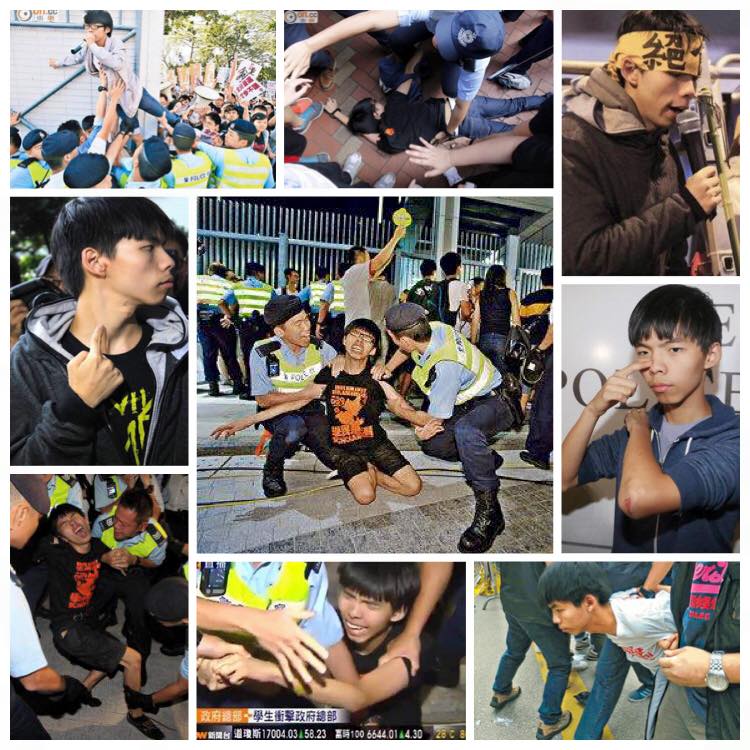
- I appreciate that the United States has to promote "pro-democracy activists"
all around the world in order to protect their own national interests, but
surely they could have found a more appealing character than Joshua Wong.
- (Wikipedia)
Diving: In soccer, diving is an attempt by a player to gain an unfair advantage
by diving to the ground and possibly feigning an injury, to appear as if a foul
has been committed. Dives are often used to exaggerate the amount of contact
present in a challenge. Deciding on whether a player has dived is often very
subjective, and one of the most controversial aspects of football discussion.
Players do this so they can receive free kicks or penalty kicks, which can
provide scoring opportunities, or so the opposing player receives a yellow or
red card, giving their own team an advantage. Diving is also known as flopping,
simulation (the term used by FIFA), and Schwalbe (German for swallow).
- Ah, yes, just like the
Fake
Car Accident Caught on Dash Cam.
- See also: (SCMP)
Viral video of man staging fake car accident on Hong Kong street.
- See also: (YouTube)
Worst
Soccer Divers and Cheaters
- The
government officials are shameless because they refused to have close contact
with the citizens. The entire event was just another hand-waving exercise in
passing.
- The government officials are shameless because they refused to be beaten up by
violent street thugs. The entire event was just another hand-waving exercise in
passing.
Videos
on the Magical Mystery Bus Tour
(ATV)
https://www.youtube.com/watch?v=JCHQA9FVI0g (evening news report)
(INT News
Channel)
https://www.youtube.com/watch?v=TesQWRrr024 (Kennedy Town, 2:47pm)
(INT News Channel)
https://www.youtube.com/watch?v=a-XtvY2fc1I (Kennedy Town, 2:59pm)
(INT News Channel)
https://www.youtube.com/watch?v=WpkdnrPG-uM (Kennedy Town: 3:30pm)
(dbc)
https://www.youtube.com/watch?v=9Lsk84FOX5Q (Kennedy Town) Police make
arrest.
(dbc)
https://www.youtube.com/watch?v=3jQXqY700H4 (Tai Po) People Power member
stages speech about heroic attack on government promotional bus. Interesting
part: "These guys won't raise umbrellas. Rainy season is coming. So the next
time they come out, we'll be praying for rain. Right or not, citizens?"
(SocREC)
https://www.youtube.com/watch?v=erKYIqxewMI (Kennedy Town) Government
promotional bus passes by in under 10 seconds.
(SocREC)
https://www.youtube.com/watch?v=IaGTsQJCbx8 (Kennedy Town) Hysterical women
screaming in front of a mass of "reporters" (=anyone with a camera/smartphone in
hand.
(SocREC)
https://www.youtube.com/watch?v=fhupmIIMQMs (Kennedy Town) People suspect
that a person is being taken away by the police.
(SocRec)
https://www.youtube.com/watch?v=MLrgUvkazvM (Kennedy Town)
Counter-demonstrators heap curses at demonstrators. "Captain America" Andy Yung
waves British colonial flag for Hong Kong independence.
(SocREC)
https://www.youtube.com/watch?v=PcpA_FX8P04 (Kennedy Town) City University
student demonstrator was arrested.
(SocREC)
https://www.youtube.com/watch?v=vWc4CA4ac_k (Kennedy Town) Female student
landed in flower bed.
(The
Standard) April 24, 2015.
Critics say Chief
Executive Leung Chun-ying and his top aides should not visit districts
during the government's propaganda campaign on the political reform package
as it is likely to cause more chaos than unity.
A clear sign of this was in Mei Foo on
Wednesday, hours after the package was unveiled, when Leung joined Chief
Secretary Carrie Lam Cheng Yuet-ngor onstage and gave her a jar of honey.
Activists swooped in with loudhailers, drowning out speeches by Leung and
Lam and forcing them to cut short their visit.
"The situation was quite chaotic and many
police officers were deployed," Lam said. "If chaos erupts each time, it
will be difficult to announce details on those visits." In such a case, Lam
said she and other government officials can only call for people to support
the political reform package without approaching them directly. Lam said the
government will still go ahead with its large-scale propaganda campaign to
"Make it happen" tomorrow.
Pan-democratic lawmaker Leung Yiu-chung
said visits by Leung will only cause more chaos and rowdy protests.
Meanwhile, the chief executive said on his
blog that Wednesday's demonstrators were like flash mobs and that such
protests had become more fierce. He said it showed that activists are afraid
of the government directly approaching people. Leung said he will continue
with the district visits to communicate with residents at a close range. He
said that on Wednesday night, some young people who look like students gave
him the dirty finger and used foul language. He questioned if such
uncivilized acts can be called democratic. Nevertheless, the government
remains willing to listen to the views of different parties, he added.
(SCMP)
Hong Kong electoral reform likely to leave pan-democrats out in the cold,
analysts say. April 23, 2015.
Under the proposal based on the framework
set down by Beijing last year, the 2017 chief executive election will be
divided into three stages: pre-primary, primary and, finally, the public
ballot.
First, an aspirant must secure at least 120
votes from the 1,200-member nominating committee to enter a primary. The
committee is expected to be dominated by Beijing loyalists.
Each nominating committee member can cast
just one vote and an aspirant can get no more than 240 endorsements at the
pre-primary stage, so mathematically there could be as few as five or a
maximum of 10 people qualifying for the primary.
Judging from past experience, getting to
the primary stage should not be difficult for a pan-democrat. In the 2011
election for the Election Committee, pan-democrats won about 200 out of the
1,200 seats. The committee selected current Chief Executive Leung Chun-ying
in March 2012.
The camp had enough votes on the committee
to back Democrat Albert Ho Chun-yan, who ran alongside Leung and Henry Tang
Ying-yen.
Moving on to the primary, the potential
candidates must fight for more than 600 nominations, or more than 50 per
cent of all members of the committee.
Officials have argued that in this round,
public opinion will still have a part to play. Candidates would be expected
to take part in televised debates, explain themselves over any impropriety
or scandals anyone might unearth and face public opinion polls on their
popularity. The nominating body cannot ignore the ratings, they say.
Legislative Council president Jasper Tsang
Yok-sing said earlier that the credibility of the chief executive race would
be challenged if the nominating committee barred a pan-democrat who excelled
in the campaign and scored well in opinion surveys from going forward to the
public vote.
Developments in the 2012 race pointed to a
tricky scenario in which Beijing and the Election Committee could not turn a
blind eye to the weight of public opinion.
In the first half of 2011, only a few
people doubted that Tang, then the chief secretary and seen as Beijing's
favoured choice, would land the top job.
But the jockeying for the position took an
unexpected turn in early October that year after Tang confessed to marital
infidelity. His popularity plunged.
In February 2012, Tang's popularity dropped
even further in the wake of a scandal over illegal structures at his home in
Kowloon Tong.
Leung, who enjoyed a wide margin over
arch-rival Tang in public support, won the top job in March 2012 with
support from 689 committee members.
Under the latest government proposal,
nominating committee members will vote on each potential candidate. Each
member must cast at least two votes. Since Beijing has capped the number of
candidates at three, this means the top two or three potential candidates
who win more than 600 nominations can proceed to the public vote.
Pan-democrats such as Kenneth Leung, the
legislator representing accountants, has said that even if a candidate from
his camp managed to garner enough nominations, he could still lose if there
were three pro-Beijing candidates winning more votes.
Ma Ngok, a Chinese University political
scientist who studies electoral systems, said the voting arrangement "would
make it much easier for Beijing to oust the pan-democratic candidate".
But a government official, speaking on
condition of anonymity, says this arrangement would actually create a small
chance for a pan-democrat to enter the public vote.
"Supporters of pro-establishment candidate
A may want to stop candidate B from the same camp from winning in the
primary. They may vote against B and in favour of a candidate from the
pan-democratic camp," the official said.
Assuming that about 200 supporters of the
pan-democratic camp sit on the nominating committee, an aspirant from the
camp would need to bet on the chance that more than 400 committee members
with a government-friendly background, who wanted to block a rival of their
favoured candidate from going forward to the popular ballot, would vote for
the pan-democrat.
But Ma said this sounded more like wishful
thinking, because no pro-establishment candidates could afford to let the
pan-democrat join the public vote and risk the chance of losing to the
latter.
At the public ballot stage, the "first past
the post" system will determine the winner in one round of voting. The
government has decided there is no need for a runoff if no candidate can win
over 50 per cent of valid votes.
The decision to hold only one round went
against the international trend, Ma said. "When an aspirant has to go
through two rounds even at the nomination stage, I don't see the logic of
holding just one round for the public ballot stage," he said.
(Reddit)
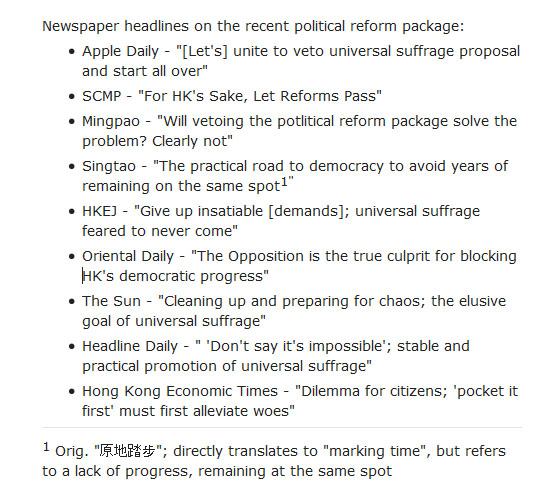
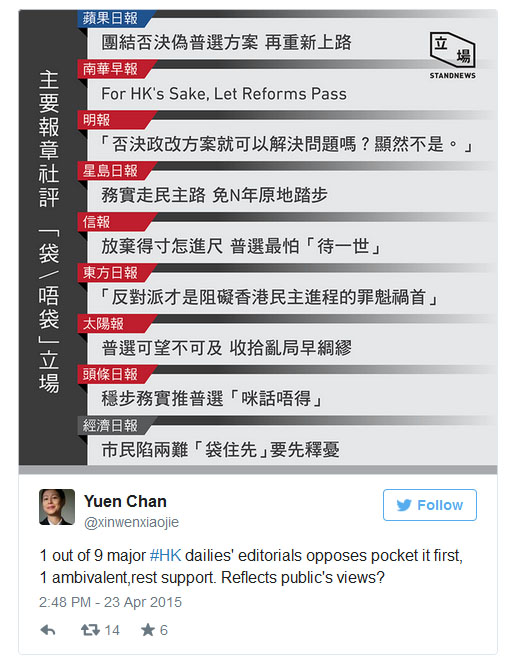
(Oriental
Daily) Front page cover

Must have for 2017
If constitutional reform fails now, "it will never ever take place."
Internet comments:
- What is missing so far is a unified
vision by the pan-democrats of what happens after the reform proposal is
vetoed when fewer than 2/3 of the Legislative Council vote for it. The
scenario is played out as follows: If more than 2/3 vote for the proposal,
it is passed and turned into law. There maybe some demonstrations afterwards
but it is a done deal. If fewer than 2/3 of Legco vote for the proposal, the
initiative dies and the new Chief Executive will be elected in 2017 by 1,200 electors
using
the old method. The threat from the government side is that this
once-in-a-time opportunity will not arise again. If so, the stark choice is
between "Pocket it first" and "Stand still on the same ground forever
afterwards."
Of course, there could be other options
too, but there does not exist any consensus about alternatives. Alan Leong
fantasizes that the five-step process for electoral reform will start again
immediately. Why would the other side be interested? They are under no
pressure.
A re-run of Occupy Central to apply
pressure? The last one went on for 79 days and achieved nothing. Zilch. A
new Occupy Central will have to be bigger (Occupy Admiralty/Mong Kok/Causeway
Bay as well as Occupy Sha Tin/Tsuen Wan/Tai Po/Tuen Mun/etc/) and longer. At
the end of the first Occupy Central, 80% of the citizens want it stopped. A new round
is going to be even more unpopular.
In the absence of a super-weapon that can
force the Central Government to yield, it looks like "Stand still on the
same ground forever afterwards" seems more and more likely.
- On one side, the argument for voting nay
is based upon "Pocket it first" = "Pocket it forever." This is by no means
certain. That is, some people will agree while others will disagree. But let
us agree to disagree.
On the other side, the argument for voting AYE is the failure to do so will
end up with the same system of 1,200 electors voting for the Chief
Executive. This is a dead certainty. The 5 million eligible voters can let
themselves be heard by voting for the nominated candidates, or cast blank
votes, or boycott the vote.
- (Speakout
HK) An animated film that illustrates that yellow cross-marks stand
for "standing still with no progress."
- Not to worry. As Chinese University of
Hong Kong professor and Occupy Central founder Chan Kin-man promised, the
Chinese Communist Party is on an unsustainable development path and they
will collapse on their own over the next few years. Genuine universal
suffrage with civil nomination will be a no-brainer. All we have to do is
sit and wait for the moment to come. We won't have to lift a finger.
- Young people are whining right now that
they will never be able to afford luxurious apartments. In the meantime,
they also reject the smaller and affordable apartments as poorly
constructed and dangerous to live in. That is why they will never have a
dream apartment of their own. Ditto voting for the Chief Executive. They
want the luxury version that is not even unavailable in the major nations of
the world (United States, China, United Kingdom, France, Canada, Australia,
New Zealand, etc) and they reject the current proposal. That is why they will never
get the universal suffrage of their dreams.
- There is no point in waiting for June to
come around. Let the pan-democrats veto the reform plan and we can continue
the way it is. First of all, it is a lot of cheaper to hold an election
among 1,200 electors than 5 million citizens (which costs $100
million). Secondly, both the central government and the pan-democrats will
be happy to work the same way as before.
- According to the Basic Law, Hong Kong's
"previous capitalist system and way of life shall remain unchanged for 50
years" after the 1997 handover. During this period, Hongkongers can effect
some changes in the political system that they hope to keep afterwards. If
they can't work out something satisfactory by 2046, their leader will be a
Communist Party Committee Secretary appointed by the central government.
That would be a genuine one-person-one-vote election, in which the Chinese
Communist Party secretary-general is the sole eligible voter. So far, they have
wasted 18 years. If they veto this proposal, it may be at least ten years
before the next window of opportunity will appear. In all likelihood, the next
proposal will
be more or less the same as the one this time.
- (Speakout
HK) Legal scholar Albert Chen Hung-yee on radio: "If you veto this
proposal, then when will you have universal suffrage to elect the Chief
Executive? That will be decided by the Chief Executive who will be elected
in 2017 by the 1,200-person election committee. That is, he will decide
whether to initiate the five-step process for constitutional reform once
more. If this
Chief Executive is not particularly enthusiastic about democracy, he may not
do anything. Even if he initiates the five-step process,
it is 99% certain that the Central Government will re-iterate the August
31st decision
made in 2014. Universal suffrage in Hong Kong will be based upon that
decision. That is, Hong Kong will go back to the same old controversies this
year, last year and the year before last. Repeated once more. What good does
it do for us to repeat this once more? I do not feel that the Central
Government will offer us (the pan-democrats) more just because we vetoed the
proposal this time."
- Legislative Councilor Raymond Wong on TVB:
Question: Do you trust the Chinese Communists?
Wong: No. I don't trust them.
Question: If you don't trust them and you veto the political reform, how are
you going to get genuine universal suffrage from them?
Wong: (pause)
(Ming
Pao Canada,
Sina.com.hk) April 22, 2015.
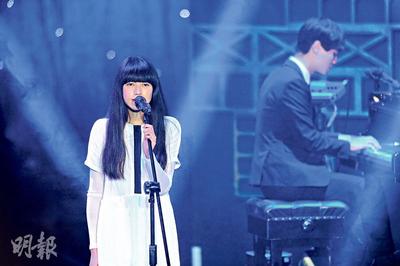
At the Hong Kong Film Awards, the
band My Little Airport played the nominated song Beautiful New Hong Kong
from the film Golden Chicken S. At the end of the song, the piano player
added a segment of the British national anthem God Save The Queen that
was not in the original version (see
YouTube).
The live broadcaster TVB cut off this additional segment with a commercial.
Why did the band do this?
According to certain speculations, the song lyrics began with "Ever since you
left, nobody knows how unhappy I have been." Also: "There is only one kind of
homesickness in this world, and that is being without you. This Hong Kong is no
longer my homeland." According to some speculation, My Little Airport added
God
Save The Queen to put an emphatic point about how they missed British
suzerainty.
TVB is being accused of engaging
in political censorship because they cut from the unscheduled God Save The
Queen to a commercial.
On their Facebook, My Little
Airport said that "the fact that TVB only aired half the song fucking expresses
the sadness in the song."
[Here is the full broadcast
segment as shown in mainland China without commercials.
https://www.youtube.com/watch?v=ktfrWOnVDRw . God Save The Queen
begins at 2:56.]
Internet comments:
- Gala events have rehearsals
beforehand so that the director(s) can run the script with a timeline (including when television
commercials are inserted). So one of two things happened. On one hand, My Little
Airport did not include God Save The Queen during the rehearsal so that
the director went ahead to cut to a television commercial as soon as the last
sentence of the original lyrics was sung. On the other hand, My Little Airport
included God Save The Queen during the rehearsal but the producer
objected because it was not part of the song as sung in the film itself. Are you
so naive as to think anyone can say/sing anything that they want (such as
making a 15-minute thank-you speech to thank your family, your co-workers, your
elementary school principal, your music teacher; or telling people to vote for
Albert Ho's designated successor in the Lok Tsui district council election in
November; or Simon Yam Tat-wah recommending Nu Pharm health products; etc)?
- This little piece of
shenanigan
disrespects the event organizer, it disrespects the audience (both at
the
auditorium and home) and it disrespects the other performers. However,
it is
perfectly consistent with the selfishness of the Yellow Ribbon Zombies.
This is the same as raising a yellow umbrella at a university
graduation ceremony.
- You have to have
commercials in order for TVB to air events such as the Hong Kong Film Awards,
the Miss Hong Kong Pageant, the Tung Wah Charity Show, etc. When do the
commercials appear? Not during the announcement of the nominees/winners and not
during the thank-you speeches. You tell me when.
- An awards show is scheduled to
run two to three hours. It is not always possible to schedule things exactly, because
some people will give long thank-you speeches. When the show is running
overtime, the director has to find some way of catching up. Is it so surprising
that the director would cut off an unscheduled playing of God Save The Queen?
- When Eddie Pang and Tang Wei were accepting prizes, time was already running
tight. They were cut off during their respective speeches. What does My Little
Airport expect with their shenanigan?
- In 2008, Paw Hee-ching was cut off in the middle of a speech for Best Actress
Award at the Hong Kong Film Awards.
- A few years ago, the "Celestial Empress" Joey Yung got her song cut off by TVB
because the program was running too long.
- A performer who wants to inject unscheduled political messages won't get
called to perform much in the future. This was unprofessional conduct.
- Cutting away right before an
important development? Have you heard of the
Heidi Game?
On November 17, 1968, the Oakland Raiders beat the New York Jets in an American
football game by a score of 43-32. With one minute go, the score was 32-29 in
favor of New York. The NBC Television Network decided to break away from the
game to air the television film Heidi. The rest was history. Eventually
there would be special commercial breaks known as TV timeouts during which all action
stop in the field while the commercials are played.
- The Hong Kong Film Awards should
have gotten ATV to broadcast the show instead of TVB. Over at ATV, they have no
advertisers left, so there won't be any commercial interruptions.
- We love Her Royal Highness (HRH)
because we used to get an official holiday on her birthday. After the
handover of Hong Kong, that holiday became Buddha's birthday.
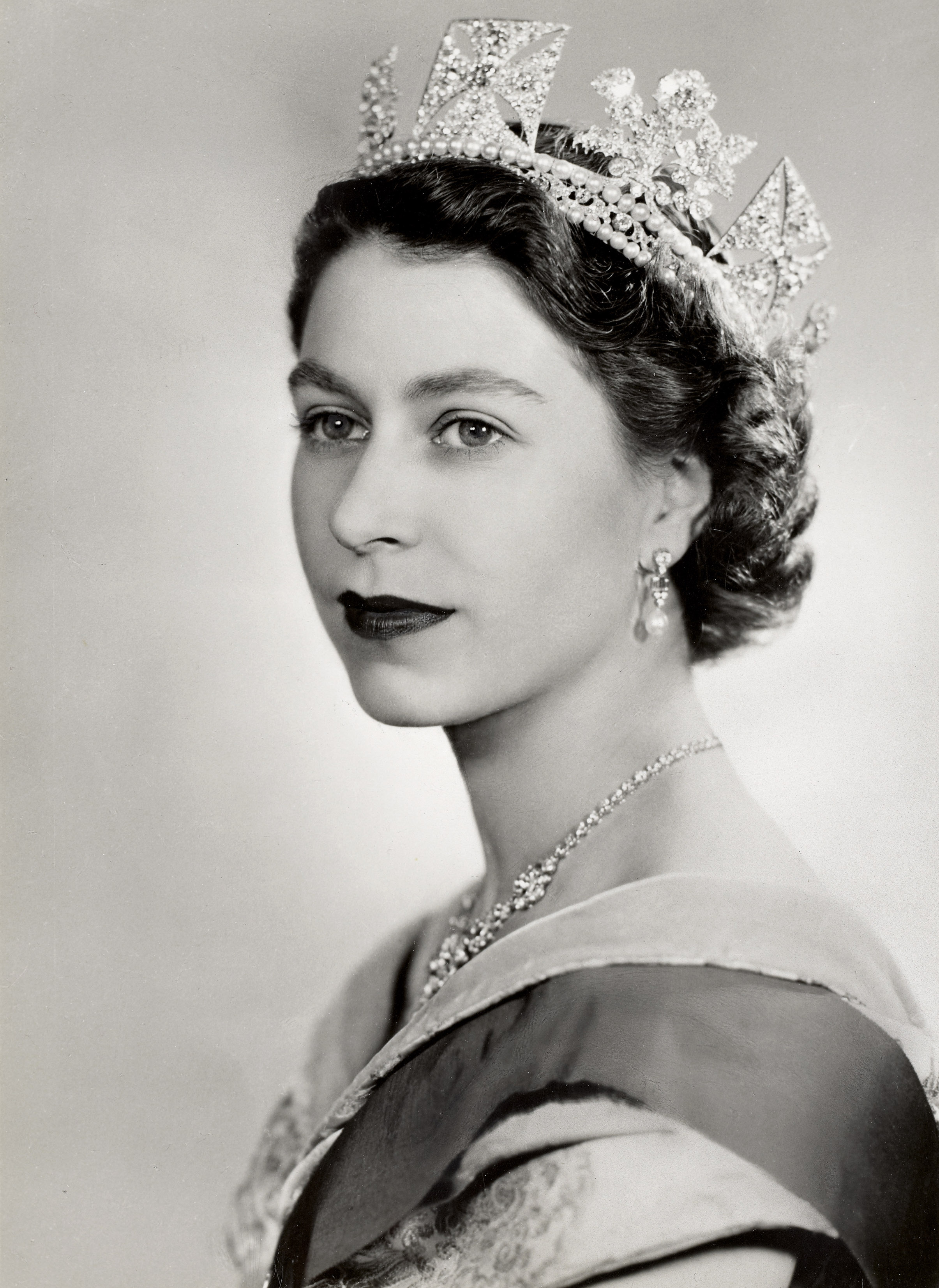
Note: The Queen's Birthday holiday in Hong Kong was on the second Monday in
June. Queen Elizabeth II was actually born on April 21, 1926.
- Did you know that they played
God Save The Queen at every film showing during the British colonial
era.
They did not play before the film starts, because they know that the
local
Chinese can be very disrespectful. Certainly you cannot expect them to
stand up
and show respect. Instead they played the song after the film ended and
everybody
got up to leave. At least, that could be considered as standing at
attention. Those who are complaining about the TVB commercials never
seem
to complain about God Save The Queen in movie houses, or at the end of
the television broadcast day.
- The original lyrics of God Save
the Queen were:
God
save our gracious Queen!
Long live our noble Queen!
God save The Queen!
Send her victorious,
Happy and glorious,
Long to reign over us.
God save The Queen!
In Hong Kong, the local Chinese
sang these Cantonese lyrics.
個個揸住個兜,
刀叉都生晒銹,
污垢又有。
朝朝都當阿茂,
晚晚會發晒吽,
又要睏路旁,
又要踎,
苦困冇盡頭
[Everybody is holding out their
bowls (note: prison inmates waiting for their meals)
The knives and forks are rusty
Full of dirt and filth too.
Every day we are exploited
Every night we are dazed
Because we have to nap on the roadside
And we also have to squat
There is no end to our suffering.]
Alternate versions are:
個個揸住個兜
踎喺街邊乞食
真係異常
[Everybody is holding out their
bowls
Squatting by the roadside to beg
This is really extraordinary]
個個揸住個兜
踎喺天星馬頭
等下就有
[Everybody is holding out their
bowls
Squatting at Star Ferry
Just wait and it'll come.]
The Hong Kong Independence Party
youngsters will be very distressed that this was what ordinary Hongkongers
thought of the British colonialists.
- When God Save the Queen
is played, the audience has to stand at attention. Therefore, the audience would
have lost the opportunity to use the toilet during the commercial break.
- Why is My Little Airport so
nostalgic about being second-class British citizens (see
British National (Overseas))? For example, as of April 6, 2014, all BNO's (who are mostly Hongkongers) coming to the UK for longer than six months
will be required to pay a "health surcharge" in order to access NHS benefits
offered to permanent UK residents.
- Do they think that the Brits
would appreciate this display of loyalty? No, the Brits would simply be
astonished by this idiocy (see
That Freedom-Hating Brit Michael Tanner).
-
World Bank database:
China GDP
2010: 5,930,502,270,414
2011: 7,321,891,954,608
2012: 8,229,490,040,100
2013: 9,240,270,462,047
United Kingdom GDP
2010: 2,407,933,767,368
2011: 2,591,846,115,476
2012: 2,615,946,487,602
2013: 2,689,454,886,797
Of course, it is never just about
GDP. The difference is that in the United Kingdom, they have the international
standard of genuine universal suffrage in which their Prime Minister candidates
are determined by civil nomination, just like the President of the United
States. If Hong Kong can have the same system as the United Kingdom, it will be
able to achieve the same GDP growth rate.
- When China began its reforms in the 1980's, the stated goals were "surpass
Great Britain and catch up to the United States." The first part has been
accomplished handily, and the second part will come soon.
- Storm in a teacup (otherwise
titled "Shooting at an airplane in my little airport"). [Note: "Shooting at
airplanes" means "masturbating" in Hong Kong Cantonese dialect.]
- Yet another
international Chinese Communist conspiracy ...
- Did CY Leung make sure that My
Little Airport's
God Save The Queen wouldn't be aired? Well, if Chief Executive Leung is
micro-managing the length of a song on a television awards show, he would be a very busy busy
man.
- Why are young people so
nostalgic about the British colonial era? Precisely because they know nothing
about it. My Little Airport started out as a two-person band at Shu Yan College
around 2001. At the time of the handover of Hong Kong, they were about 13- or
14-years-old. They don't know a lot.
- Daniel Ma, the leader of the Hong Kong Independence Party, is 22-year-old now.
At the time of the handover of Hong Kong, he was about 4 years old. When he went
up to tell ex-Governor Chris Patten about missing him so much, even the fat man
smirked and asked, "Can you really remember me?"
- Alternate WHAT IF scenarios:
- What if My Little Airport sang
the Chinese National
Anthem (March of the Volunteers) instead in order to be nostalgic about
the
Hong Kong Handover Ceremony 1997 (see 7:30 into the video followed by
the image of a grinning Jiang Zemin).
- What if
Hero won the 2002
Oscar Best Foreign Film and the director Zhang Yimou gets on stage to sing the
Chinese national anthem?
- Would the American national
anthem Star Spangled Banner be acceptable (see
Whitney
Houston)?
- What if My Little Airport sang
the Nazi marching song
Erika (or
Auf der Heide blüht ein kleines Blümelein) and TVB broadcast it in full?
- What if My Little Airport led
the audience to sing The Internationale. It can be quite moving (see, for
example, the
1978
Soviet Union National Congress, the movie
Reds
or the Chinese rock version by
Tang
Dynasty?)
- What about Anita Mui's
Bloodstained Glory? On one hand, it is a very popular Chinese patriotic
song about Chinese soldiers from the Sino-Vietnamese war. On the other hand, Mui
is using the song in conjunction with images from the June 4th 1989 movement.
This can please both sides as well as displease both sides.
- What if the Hong Kong Police
Choir were to sing
La
Marseillaise?
- For any film awards show, anyone
saying/singing anything extraneous to the scheduled program would be fucking cut
off PERIOD END OF DISCUSSION
- Everybody is talking about
everything else except the song itself. Have you tried listening to it? It is
really boring and undistinguished. If such a song could become one of the five
finalists, there is not much future in the Hong Kong music scene.
- I got up and went into the kitchen a few seconds into the song. I didn't miss
any British anthem.
- The British national anthem was out of tune. Was that an intentional insult?
- How come they get to see the
God Save the Queen segment in mainland China but not in Hong Kong? The
answer is that mainlanders wouldn't even recognize the song if they heard it.
(Wikipedia)
The Greed of Man.
The Greed of Man is a Hong
Kong television series first broadcast on TVB Jade in 1992. The story, spanning
three decades from the 1970s to the 1990s in Hong Kong and Taiwan, addresses
various social and financial phenomena of the times, from triad violence to
corruption in the Hong Kong stock exchange. It featured a top roster cast,
including veteran TVB actors Adam Cheng, Damian Lau and Sean Lau. The series is
also well remembered for a Hong Kong stock market cultural phenomenon called the
"Ting Hai effect".
(Wikipedia)
Ting Hai Effect
The Ting Hai effect, also known as
the Adam Cheng effect, is a stock market phenomenon in which there is a sudden
and unexplained drop in the stock market whenever a film or a television series
starring Hong Kong actor Adam Cheng is released. It still remains as a popular
topic among stock brokers, years after the television drama The Greed of Man
was broadcast in Hong Kong in late 1992. The effect is named after Ting Hai, the
primary antagonist in the drama, who was portrayed by Cheng.
1990s
- October 1992: The Greed of Man
made its debut on TVB. The Hang Seng Index fell by between 598 and 600
points
- November 1994: Instinct made its
debut on TVB. The Hang Sang Index fell by more than 2,000 points.
- September 1996: Once Upon a Time in
Shanghai premiered on TVB. The Hang Seng Index fell by 300 points.
- June 1997: Cold Blood Warm Heart
made its debut on TVB. The Hang Seng Index accumulated 735 points in
losses.
- December 1997: Legend of Yung Ching
was aired. The Hang Seng Index fell by 1.4%.
- June 1999: Lord of Imprisonment
was aired. The Hang Seng Index fell by 6.5%.
2000s
- September 2000: Divine Retribution
was aired on ATV. Due to the bursting of the dot-com bubble earlier that
year, the Hang Seng Index dropped by an accumulated 1,715 points, leading
to falls in other stock markets around the world.
- March 2004: Blade Heart premiered
in Hong Kong. The Hang Seng Index fell by 550 points over three days due
to high oil prices and instability in the Middle East.
- October 2004: The Conqueror's Story
premiered in Hong Kong. The Hang Seng Index fell by 198 points on the day
the first episode of the drama was aired.
- March 2005: The Prince's Shadow
was broadcast. On 14 March, the Hang Seng dropped by 100 points before
noon but rose back by 90 points by the end of the day.
- July 2007: Return Home was
broadcast. The Hang Seng Index fell by 1,165 points.
- 30 March 2009: The King of Snooker
premiered in Hong Kong. The Hang Seng Index fell by 663.17 points.
2010s
- 21 May 2012: Master of Play made
its debut on TVB. The Hang Seng Index fell by 10%
- 4 April 2013: Saving General Yang
was released in Beijing. The Hang Seng Index fell by 610 points on the
following day of the premiere.
- 20 April 2015: The Greed of Man
was rerun on TVB. The Hang Sang Index fell by 558 points on the first day
of rerun.
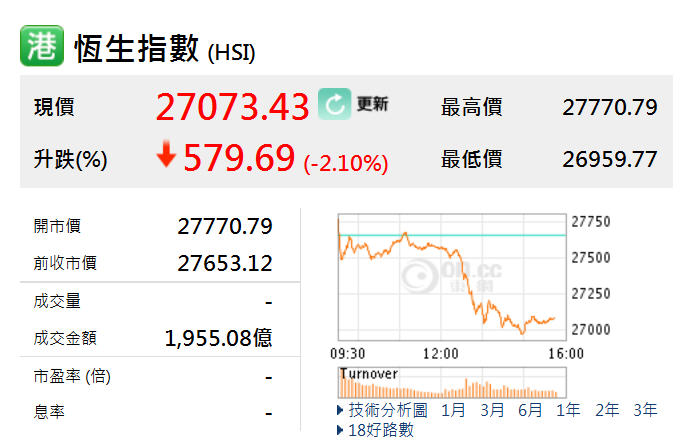
The Ting Hai effect has led to Adam Cheng
attracting much attention from the press. Whenever a new film or television
series starring Cheng is about to be broadcast, some stockbrokers and
investors in Hong Kong anticipate a drop in the market.
While some investors have argued that the
effect is no more than a series of coincidences and amounts to nothing more
than a self-fulfilling prophecy, the phenomenon is regarded by some as more
than coincidental. The French bank Crédit Lyonnais wrote a report on it.
(Apple
Daily) The first episode of the re-run of The Greed of Man had
an average audience rating of 5.6%. It was shown on pro-establishment TVB at
12:15am Hong Kong local time. This compares to the prime-time (8:00pm-10:30pm)
average audience of 0.5% at pro-democracy HKTV.
(CNBC)
The TV show that makes a stock market drop. April 17, 2015.
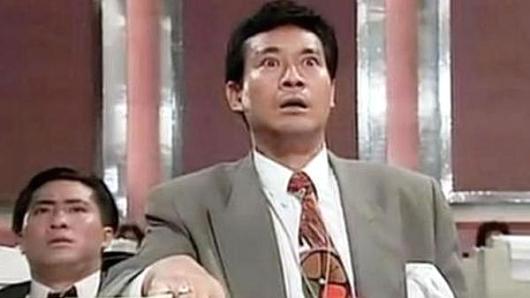
When this Hong Kong actor appears on the
silver screen, watch out for a possible selloff in the Hang Seng. The
index's recent rally to seven-year highs could abruptly pull back on
Tuesday after the television drama "The Greed of Man" from the local TVB
network reairs in Hong Kong at 12:15 a.m. local time (12:15 p.m. Monday
ET).
First aired in 1992, the show stars Adam
Cheng in the role of "Ting Hai." The character is a stock market
speculator who put a negative face on the financial world with his triad
involvement. The local stock market promptly plunged 20 percent over the
following few weeks, kicking off a phenomenon called the "Adam Cheng
effect" or "Ting Hai effect."
In the two decades since, nearly every time
the 68-year-old Cheng has appeared in a movie or television show—which has
been more than 30 times—the Hang Seng declined. Most recently in 2013, the
index fell nearly 3 percent in the week after the premiere of his movie
"Saving General Yang." Even with the April 13 announcement of the reshowing
of "The Greed of Man" there was a 1.6 percent decline in the index the next
day.
The Hang Seng and the Shanghai composite
have recently rallied to seven-year highs, driven mostly by hopes for
government stimulus to combat slowing economic growth. "There are things
going on that defy logic," Lance Roberts, general partner at STA Wealth
Management, said of the recent rise in Asian stocks. "The Chinese have a
gambling mentality anyway. This plays into the whole mentality they have
about risk-taking."
Chinese futures sold off in after-hours
trading Friday on news of coming government regulations to expand short
selling and limit over-the-counter margin trading. "China is a market that
is idiosyncratic," John Canally, investment strategist and economist at LPL
Financial, said of the futures' decline on Friday. "At any given time you
could get a ... dose of good news or bad news and those tend to even out."
Representatives of Citi and Standard
Chartered in Hong Kong said they did not take the "Adam Cheng effect"
seriously. CLSA research reports on the phenomenon have not found a logical
cause for the effect.
The actor said that if the effect was
really true, he would have generated a fortune already, and financial
professionals could have retired already, according to a report by the
mainland Chinese paper People's Daily. For example, the article noted
that Cheng's appearance in Hong Kong television dramas in 2005 and 2006 did
not cause a selloff in the Hang Seng.
If there is any rational explanation, it
would be that the actor's reappearance is a reminder of how volatile and
crazy speculation in the stock market can be. Besides the dramatic
presentation of the global 1973 stock market crash, the drama's
self-appointed stock market "god" tells Cheng's rival Fong Chin-bok the key
to winning in the stock market is "to leave early." Whether or not that
advice is solid, Fong wins out in the end.
(SCMP)
Hong Kong actor Adam Cheng says stock market influence is just fiction. May
1, 2015.
While legendary Hong Kong actor Adam
Cheng Siu-chow's role in the 1992 TVB soap opera The Greed of Man
may have been a tour de force, neither the actor nor the show are any kind
of a market force, Cheng says. "It just can't be true, but I am used to it
now," Cheng said in an exclusive interview with the South China Morning
Post.
The 68-year-old actor has been a
household name for more than half a century. An accomplished singer and
dancer, as well as an actor, Cheng has held leading roles mostly in TVB
productions since the 1970s, and also at ATV in the 1980s.
But none was as "evil and dark" as his
portrayal of Ting Hai in the 40 episodes of The Greed of Man during
the autumn of 1992. The drama told the story of the rise of an uneducated
young man through betrayal and corruption. At the end, protagonist Ting
paid the price in the derivatives market and lost everything, including
his four sons who, at their father's order, jumped off the roof of the
stock exchange building. "I had some hesitation with the script, and my
wife was plainly opposed to it. But in the end I went ahead with it
because I believe there is a sinister side in human nature," Cheng said.
The gruesome ending was the talk of the
town and came to be seen as a curse when the Hang Seng Index lost more
than 1,200 points, or 20 per cent, within a month after the series. In
what has become known as the Ting Hai effect, observers point to sudden,
unexplained declines in the stock market when a Cheng programme or film is
released.
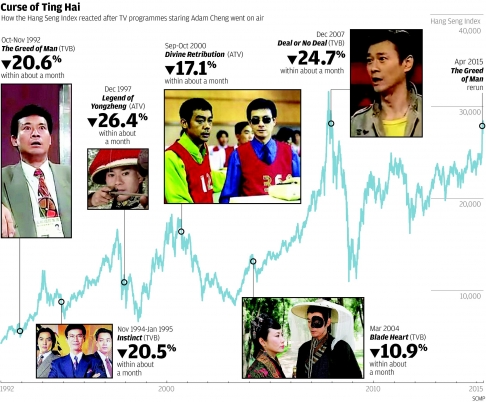
A 2004 report by Credit Lyonnais
Securities Asia on the 10 per cent loss in the Hang Seng Index after
Cheng's new series Blade Heart, said: "Although no logical reasons
could be found, the predictive power of the 'Adam Cheng effect' is
mysteriously accurate." However, Cheng said: "I think it's just an excuse
for securities brokers to create some kind of a sensation for ignorant
investors, and prompt them to action.
"Reporters have asked me repeatedly all
these years about the phenomenon and they seem to have made me what they
said I am - that is, the culprit responsible for those [market] plunges."
But diehard believers remain unwavered. A rerun of the original 1992
The Greed of Man on April 20 sparked a fresh round of discussions in
blogs and print.
Bloggers in local online portals have
posted a variety of requests, from charging TVB for market manipulation to
calling for an immediate halt to the show and even a boycott of TVB. But
Cheng was unfazed. "I told everyone the stock market would go up and I was
right because it did go up after losing on the day of the first episode,"
he laughed. "My friend, who has a heavy load of stocks, told me the
internal consumption on the mainland is so huge that the stock market
would only go up in order to sustain the consumption level," he said.
Asked if he had ever done any
short-selling when his series was about to go on air, he said: "I never
pay attention to that because I just don't believe in the so-called
phenomenon. I invest but don't speculate in stocks, and I win in the long
run."
Apart from the so-called Ting Hai Effect,
The Greed of Man was popular because of the character of Ting Hai. Here is
the summary at
Wikipedia
(Chinese):
Ting Hai was good friends with Fong
Chun-sun, but beat Fong up viciously over a misunderstanding over the
17-year-old girl Lo Wai-ling. The girl merely wanted Fong to listen to her
complaints. For example, all she wanted was to go home to live with her
uncle, but Ting wanted her to be the mother to his four sons. She said: "I
was so tired and sick of this. All I wanted was to go back home. Instead
Ting went out and brought a pizza home, because he insisted that was what I
wanted. He just never listens to what I say. And then he went and beat up my
uncle and smashed his store ..."
Fong was unconscious after the beating, and
lost his family fortune. After Fong recovered, Ting Hai showed up again and
beat him to death over yet another misunderstanding. Ting Hai fled to Taiwan
when he was sent to prison. At prison, he got into more trouble and killed
someone else. Meanwhile his four sons formed a triad gang and managed to get
their father back to Hong Kong. But Ting Hai had to stand trial for the
murder of Fong with all the physical evidence being against him. His sons
hired an expert doctor to falsely testify that Ting had terminal cancer.
Ting was released and made a fortune in the stock market, until Fong's son
destroyed the fortunes of the Ting family.
Ting Hai is a physically strong man, he was
a freestyle martial arts champion (he beat Lo Wai-ling's cousin to death in
the boxing ring), he is brash, he is barbaric, he is peremptory (that is, he
insists on immediate attention or obedience in a brusquely imperious way)
and he rationalizes all his actions in fantastical ways.
(Wikipedia)
Psychopathy
Psychopathy is traditionally defined as a
personality disorder characterized by enduring antisocial behavior
(including both isolationist and gregarious social behaviors), diminished
empathy and remorse, and disinhbited or bold behavior.
The triarchic model emphasizes three
observable characteristics:
- Boldness. Low fear including
stress-tolerance, toleration of unfamiliarity and danger, and high
confidence and social assertiveness.
- Disinhibition. Poor impulse control
including problems with planning and foresight, lacking affect and urge
control, demand for immediate gratification and poor behavioral
restraints.
- Meanness. Lacking empathy and close
attachment with others, disdain of close attachments, use of cruelty to
gain empowerment, exploitative tendencies, defiance of authority, and
destructive excitement seeking.
With all this background information in
place, you now get to see how Ting Hai can be used to psycho-analyze the
Umbrella Revolution in Hong Kong.
- (The
Stand News) April 20, 2015.
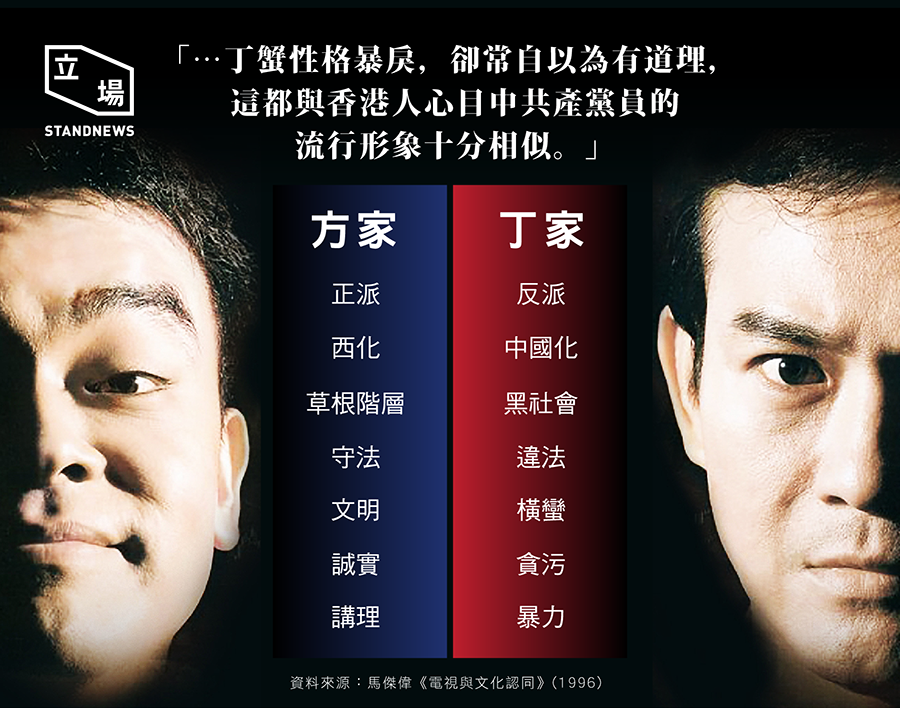
"Ting Hai is violent and brash, he usually
think that he is being reasonable ... these characteristics are consistent
with what the Hong Kong people think the Chinese Communists are like"
from Ma Kit-wai's <Television and cultural identification> (1996).
The Fong family: Upright, westernized, grassroots, law-abiding, civilized,
honest, reasonable
The Ting family: Villainous, sino-cized, triad gangsters, law-breaking, barbaric,
corrupt, violent
- (Local
Press) TV dramas were key to the formation of Hong Kong identity.
Benjamin Garvey. April 24, 2015.
TVB is showing reruns of “The Greed of Man”
(大時代). It’s a 40-episode drama with a stock market theme broadcast by TVB in
1992. The re-airing of the drama coincides with the recent sharp rise in
local stocks.
When I read the news, I immediately
recalled that the show had been mentioned in the book about Hong Kong
identity that I was reading.
Written by CUHK academics, it cited “The
Greed of Man” as an example of how TVB-produced television dramas had
stigmatized mainlanders less after the Sino-British Joint Agreement in 1984:
for political and commercial reasons, after the signing of the treaty that
signified the inevitable return to Chinese sovereignty of the entire colony,
TVB began to emphasize the similarities between Hongkongers and mainlanders
and downplay the differences its earlier dramas, made in the 1970s and early
1980s, had highlighted.
Dramas in the 1970s had portrayed
Hongkongers as capitalist and affluent and Chinese as poor and uneducated,
suffering under the authoritarianism of the communist party. These
depictions engendered a local Hong Kong identity.
“The Greed of Man,” the story of which
spans the 1970s through to the 1990s, ostensibly avoided any identity
politics.
Fong, the story’s hero, becomes rich with
investments and eventually takes revenge on the family of the man that
caused the death of his step-mother and three sisters, his childhood friend
Ting.
According to scholar Eric Kit-wai Ma, most
Hongkongers watched the series without seeing any political messages, with
the ups and downs of the stock exchange allegory for the struggle between
the protagonists.
However, some viewers saw allusions to the
anxieties Hongkongers were feeling in the run-up to the 1997 handover,
especially after June 4, 1989.
The honest Fong was seen as a Hongkonger; the violent and corrupt Ting a
personification of the Chinese Communist Party.
The names of Fong’s family members were
common in Hong Kong; those of Ting’s were not and even had negative
connotations.
Fong was cultured; he liked Western music
and his father studied in the West; Ting was stubborn and uneducated but
with a penchant for quoting traditional Chinese proverbs.
Ting persecuted and killed with a false
righteousness but said he was honorable. He exercised patriarchal control
over his sons, eventually ordering them to commit suicide by jumping off the
top of the stock exchange building after they’d lost all their money. (Ting
also jumped but survived and spent the rest of his life in jail.)
The “Hong Kong versus the nasty CCP”
narrative might have been what just a few viewers, eager to find political
meaning, saw.
Scholars say mass media is key to
nation-building and the formation of a national identity. Printing presses
in Europe in the 15th and 16th centuries, using different vernacular
languages, created different “imagined communities.”
These communities saw themselves as
belonging to the same virtual world, sharing the same thoughts. Their
members felt some kind of fellowship with each other, even though they would
never meet once in their lives. Eventually, these communities led to the
creation of national boundaries, nation states and nationalism.
A comparable identity-building process
occurred in Hong Kong in the 1970s through television dramas as the city
grew increasingly affluent.
As both the colonial and Beijing
government’s refrained from stoking any kind of nationalist sentiment (CCP
supporters had invoked Chinese nationalism during the 1967 riots), Hong Kong
media companies took on the role of creating a collective identity, but one
based on culture, not politics.
This local “imagined community” was
reinforced by differences in lifestyles, daily routines, career patterns,
aspirations and values in the colony and on the mainland. The authoritarian
nature of the Chinese government added to the sense of separateness.
These divisions created a social and
psychological boundary, with Hongkongers’ encounters with mainlanders
tending to strengthen rather than dilute the division.
The 80-episode drama “The Good, the Bad,
and the Ugly,” (網中人) first broadcast in 1979, included a character nicknamed
“Ah Chan” (阿燦). He was a mainlander who had been separated from his family
for 20 years after they’d left for the colony and he stayed.
He joined his family in Hong Kong but
didn’t fit in as he didn’t understand Hong Kong’s social norms. Moreover, he
wasn’t well educated and he was lazy, sleeping at work and staying in bed
until afternoon; he threw bottles out of the windows of high-rise buildings;
he wanted to become rich but didn’t make any effort; he stole from the
jewelry shop he worked in.
Following the airing of the series, “Ah
Chan” became a label Hongkongers used to refer to “country bumpkin”
immigrants from the mainland. According to the scholar Ma, the television
show effectively initiated a stigmatization of mainlanders that persisted
for decades.
Hong Kong identity emerged as mainlanders
were portrayed as outsiders and loyalty to the Chinese nation was
suppressed.
The media started downplaying local
identity after 1984. And since 1997, they have been promoting Chinese
national identity and suppressing local identity.
Nowadays, with mainstream Hong Kong media
increasingly controlled by Beijing, Hongkongers, particularly the young, are
going online to consume media. An “imagined community” is forming on
Facebook and Whatsapp. The local Hong Kong identity that’s been suppressed
since the handover is reemerging there.
(Sina.com.hk)
April 29, 2015.
Some people think that Ting Hai stands for
the Communist Party with its obsessive-compulsive to control, whereas the
death of Ling forebodes the future of Hong Kong. According to TVB editorial
committee member Tsang Kan-cheung who was part of the script-writing team
for The Greed of Man, "We definitely weren't thinking about that.
This is a good show which covers a lot of topics. You can approach it with
any angle that you want to and you are going to get supporting explanations.
For example, a critic at the time said that Ting Hai and his four sons
clearly stood for the five stars of the Chinese national flag. I didn't know
whether to cry or laugh when I read that."
- The Yellow Ribbons as Psychopathic
Personalities:
- Dimension 1 (Boldness):
- Stress-tolerance
"I don't care about majority opinion.
Most Hongkongers are Hong Kong pigs anyway, and their opinions count for
nothing. All I know is that I want genuine universal suffrage (whatever
that is)."
"If your parents don't agree with your
work for the Revolution, then break off relations with them permanently."
Thus spake Cheng Chung-tai of Civic Passion.
- Toleration of unfamiliarity and danger
" I don't care what it takes. I just want
civil nomination for the Chief Executive. I don't care if the Basic Law
doesn't provide for it. If the Basic Law is getting in the way, just get
rid of it then. I only want genuine universal suffrage."
"Don't quiz me about the details of the
August 31st decision of the National People's Congress Standing Committee.
I don't need to know the three barriers. All I need to know is that I must have genuine
universal suffrage in the form of civil nomination because it is the
international standard."
"Hong Kong independence means war with
China? We'll worry about that when the moment comes, but let's get there
first."
"War with China means that water, food
and electricity will be cut off? We'll worry about that when the moments
comes, but let's get there first."
- High confidence and social
assertiveness
"I am so uninterested in what other
people have to say. All I know is that I am fucking right."
"I know that there are less than 100 of
us demonstrating here, but we know that we represent the people of Hong
Kong."
"Do not tell me about public opinion poll
results. They're all lies. Everybody that I know agrees with me (or else I
unfriend them)."
"The ten of us are demonstrating here
because the citizens are angry and they can't make a living anymore."
"If you disagree with me, then you must
be a paid agent of the Chinese Communists."
"We are the Valiant Warriors of the Hong
Kong City-State. With bare hands, we shall vanquish the People's
Liberation Army. It doesn't matter if they have the guns, cannons, tanks,
airplanes and nuclear bombs. We are valiant and we will win because all the
people of Hong Kong will stand with us."
- Dimension 2 (Disinhibition):
- Problems with planning and foresight
"Let's scale the wall outside Government
Headquarters and take over Civic Plaza."
"Let's lay siege to Government
Headquarters."
"Let's break into the Legislative Council
building by force."
"And then what? Why are you asking such
silly questions? Are you a leftard (=leftist retard) with all your
considerations and concerns? Do as the Nike slogan says: Just Do It!"
"If Chief Executive CY Leung won't resign
immediately, then I will mail my estimated tax payments in the form of
2,000 small-amount checks."
"What does it take for us to stop
Occupying the streets?
- Hong Kong Special Administrative Region Chief Executive CY Leung must resign
- The Political Reform trio of Chief Secretary Carrie Lam, Secretary for
Justice Rimsky Yuen and Secretary for Constitutional and Mainland Affairs
Raymond Tam must resign
- Hong Kong Police Commissioner Tsang Wai-hung must resign
- A formal and thorough investigation of police violence must be conducted
- The proposed constitutional reform package must be withdrawn
- The National People's Congress must rescind its August 31st decision about
the 2017 Chief Executive election procedure
- The National People's Congress must apologize to the people of Hong Kong
- Civil nomination must be used in place of the nomination committee for
Chief Executive election in 2017 (and the relevant part of the Basic Law
will be amended to reflect this change)
- The Functional Constituencies of the Legislative Council must be
eliminated in the 2016 elections (and the relevant part of the Basic Law
will be amended to reflect this change)
- The forecourt of the Central Government Complex shall be formally named
Civic Square and be open to the public
- The Hong Kong Golf Club course in Fanling shall be paved over to make
way for public housing
- The original Star Ferry/Queen's Pier shall be restored
- The teaching of putonghua must be extirpated from the educational
system
- The third runway at Hong Kong International Airport must not be built
until the need actually arises
- The one-way visa program for mainlanders to re-united with their
families in Hong Kong must be stopped effectively immediately
- ...
- Lacking affect and urge control
"Are people's livelihood being affected
by Occupy Central/Causeway Bay/Mong Kok? Why are you telling me this? Just
tell those people to get a job. Or go on the dole. Or something. All I
care about is that I get genuine universal suffrage here and now."
- Demand for immediate gratification
"We want genuine universal suffrage
(defined as the international standard of civil nomination of the Chief
Executive) here and now. After that happens, I'll surely come up with
something else that I have to have immediately."
- Poor behavioral restraints
(Speakout HK)
https://www.youtube.com/watch?v=gisNixIsJZk Regimentized quality of the
demonstrations. At the bottom of the stairwell from Tamar Park to Lung Wo Road,
shields were passed from the back to the front.
0:03 (Public announcement system): Friends, this is the appeal from Scholarism.
Our action tonight has non-violence as the principle. Non-violence as the
principle.
0:14 (slogan chanting) Surround Government Headquarters. Surround Government
Headquarters. Surround Government Headquarters. Surround Government
Headquarters. Escalate action. Escalate action. Surround Government
Headquarters. Escalate action.
0:31 (female voice): Everybody continue ahead. Tonight we will surround
Government Headquarters and the Chief Executive's Office. Right now, we are
crossing Tamar Park towards Lung Wo Road.
0:42 (Police): To avoid causing physical harm to people, please do not push
forward.
0:51 [shield being passed from the rear towards the front line people]
0:52 (Demonstrator): Evil cop! Evil cop! Evil cop! Evil cop!
1:00 (Demonstrators) Chu King-lun! Keeps a mistress. Chu King-lun! Keeps a
mistress. Chu King-lun! Keeps a mistress. Chu King-lun! Keeps a mistress.
1:10 (Demonstrators) Open the road! Open the road! Open the road! Open the road!
Open the road! Open the road! Open the road! Open the road!
1:26 (Police): Will the people up front not charge at the police defensive line? There are many people
on the stairway. Do not push forward. Because it may affect the safety of everybody."
1:38 (Demonstrator using megaphone): If you continue to suppress our right to
proceed to the front of the Chief Executive's Office to lay siege for a little
bit, we will use our own method to get out.
1:45 (Demonstrator): Will the police show some restraint and retreat!?
1:46 (Police): Please do not charge at the police defensive line. Thank you for
your cooperation.
1:55 (Demonstrator using megaphone): Friends up front! Friends up front! Our
fellow warriors! Do we want to get out there!?
1:58 (Crowd): We do!
2:00 (Demonstrator using megaphone): Do you want to get out there!?
2:01 (Crowd): YES!
2:02 (Demonstrator using megaphone): Are you determined?
2:02 (Crowd): YES!
2:04 (Demonstrator using megaphone): One! Two! Three!
[Crowd surges forward.]
2:11 (Crowd): Open the road! ...
[Subtitle: So much for the Federation of Students' plea "to stick to the
principle of non-violence and not to provoke or charge at the police."]

(Here is a TVB screen capture of an Occupy Mong Kok demonstrator
announcing: "I feel that the law comes second.")
- (The
Stand) Legislator Jeffrey Lam. June 20, 2015.
With their moral superiority mindsets,
everything the pan-democrats say and do is right and all others are wrong.
This leaves them unable to turn round, nor even narrow differences with
all others.
So even when the central government makes it clear that the
August 31st decision by the National People’s Congress Standing
Committee is to protect national security and stability, which are the
most important fundamentals for democracy, what the pan-democrats do is
to adopt a "one ear in, one ear out" mentality.
This comes to my mind is one of the
main characters of the popular TV drama – Ting Hai, who is played by
Adam Cheng Siu-chow. Ting Hai is a murderer filled with a suffocating sense
of moral superiority. In the end, he goes unpunished, but others suffer.
It is most unfortunate that the
pan-democrats impose their usual sense of moral superiority on the rest
of society. It eventually led to the 79-day Occupy movement that
involved many young people, and the future of a divided society such as
Hong Kong remains to be seen.
- Lacking empathy and close attachment
with others
(Occupy Causeway Bay
apologized to the local residents and
businesses who have been "inconvenienced" by the continual road blockage
by taking a collective bow in front of the media.
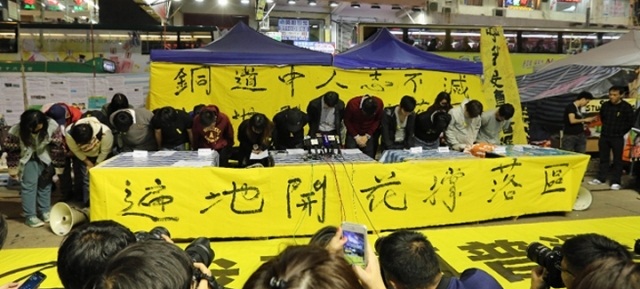
Some people have lost income, jobs and businesses. To Occupy
Causeway Bay, this was just minor inconvenience. They have no idea how
other people live.)
https://www.youtube.com/watch?v=1vxUt5QW-yk
0:01 (VO) It's after 7am. Citizens walk from Admiralty Centre across
the pedestrian overpass to go to work at Government Headquarters. Some
demonstrators have used metal barricades and garbage cans to set up a road block
to prevent entrance. This those who have to get to work from there very
unhappy.
0:28 (Male) I want to go to work one day at a time. Don't talk to me
about those things. I didn't go to work for four days in order to avoid
you people. To avoid you people.
0:38 (VO) A janitor had to go through here to work at Government Headquarters.
0:42 (Elderly woman) Hey, hey, don't pull. I have to pass through.
0:43 (Male) Grandma, are you going to work?
0:45 (Elderly woman) I have to eat. Make way. Don't hold.
0:48 (Rico Lo) Grandma, at this time, everybody ...
0:50 (Elderly woman) Do not call me Grandma. Grandma has to eat.
You don't have to eat. Yes. You let me through. I want to go
to work.
0:55 (Male) The decision to let people leave but not to enter was made by
everybody.
0:58 (Elderly woman) A person has to breathe. A person lives between
breaths. Why don't you spend your time well each day? Why do you
have to cause chaos in Hong Kong?
1:06 (VO) Ultimately, the demonstrators let Grandma go through by herself.
Afterwards someone else wanted to go through.
1:13 (Female) Everyday, I go down this road to go to work. I am just
going to work as usual. This is a very small and humble request. I
want to man my job post.
1:25 (VO) The police showed up and wanted to remove the barricades.
1:29 (Crowd) Not allowed to remove! Not allowed to remove!
1:33 (VO) A group of contract security guards also asked the demonstrators
to let them pass through.
1:34 (Male) You give us a path to go through, alright? Okay?
1:38 (Rico Lo) We really cannot do that.
1:39 (Male) Then there is no way. We have to go to work. The
security guards pushed the metal barricades back and forced their way through.
1:45 (Rico Lo) Our goal is to paralyze Government Headquarters. If
one person gets in, it means that the Government Headquarters will be back in
operation. Whether we let someone through is another matter. If you
remove these metal barricades, then does it mean that you can also remove all
the other metal barricades around Government Headquarters? This is
something that we cannot accept.
-
(Oriental
Daily) October 7, 2014. About a dozen Chinese University
of Hong Kong students gathered outside the University Station MTR exit.
They knelt down in a row with the banner: "We are forced to disrupt people's
livelihood because the people can't make a living anyway."
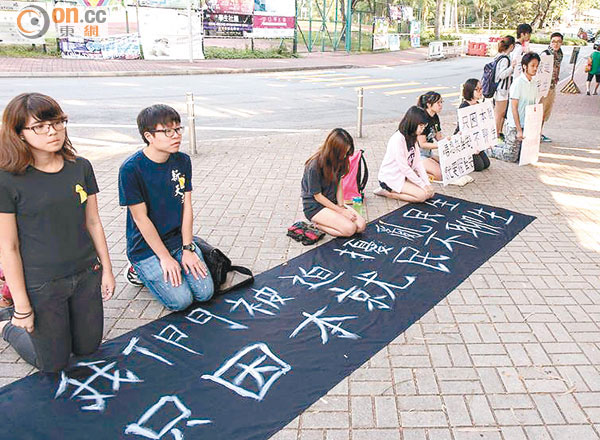
- Disdain of close attachments
(extracted from
DarkKeiKei.blogspot.hk)
A movement has to have the numbers in
order to become powerful. Apart from cultivating an elite corp of valiant resisters,
it is also necessary to provide a gradual path to popularize the resistance.
Thus, the general stages of such a path are:
Become interested in -> Beginner level
-> Intermediate level -> Advanced level -> Elite status.
As you go up the ladder, the number of
persons at each level necessarily decreases.
In the context of the resistance
movement, the stages are:
"Hong Kong pig" -> Pay attention to
politics -> Demonstration march -> Assembly -> Stay and defend -> Resistance ->
Valiant resistance
I support valiant resistance, but there
has to be a process by which a "Hong Kong pig" evolves into a "valiant
resister." If you curse out anyone who say that they adhere to "peace, reason, non-violence,
non-foul language," you will chase away many of those have so far progressed to
join demonstration marches and assemblies.
So just keep spreading the message of
valiant resistance. Those who are capable of thinking and who frequently read
information from the Hong Kong City-State may even grow up and become valiant
resisters.
- Use of cruelty to gain empowerment
Reclaim/Restore Tuen Mun
https://www.youtube.com/watch?v=FymgsG_ck1A (Apple Daily news report)
0:34 Mother and daughter being harassed
1:06 PrizeMart worker: "A whole group of people came in. They kicked our
gate. They cursed people and
told people to go back to China, the parallel goods traders to go back to China.
But our customers ... most of our customers are Hongkongers."
1:22 The male customer at Chow Sang Sang jumped up and said: "I am a Hongkonger!
... You even make noise when a Hongkonger wants to shop!"
1:50 demonstrator says that he agrees that the method was wrong, but he
wants to know where can they assemble to demonstrate without police
presence.
2:02 A young man walks up and kicks the luggage of a woman, then flees
2:33 Protestors move barricades onto the road to stop buses from
departing. A demonstrator gives double middle-fingers salute to bus
passengers.
2:49 Old man wearing Tuen Mun FC uniform is kicked from behind. Another
demonstrator tells him not to pretend to be kicked.
2:57 Tuen Mun Park music-playing grandpa Kuen is attacked by demonstrators
just because he was pushing a handcart carrying his audio-visual
equipment.
3:37 Police arrests a demonstrators who pleads for mercy.
- Exploitative tendencies
"When a demonstrator does something in
the name of freedom and democracy, he should be given a lenient sentence
(such as a three-month probation) because his intentions were noble even
if his actions were ill-considered."
"Young people are the pillars of our
society, so you must not ruin their futures with criminal records."
May 2013 Federation of Students
demonstration:
https://www.youtube.com/watch?v=UJXYdirwsDY.
6:11 Male student in grey t-shirt shoves female student in white t-shirt towards
a uniformed policeman in a human chain. High-pitched female shrieks.
6:55 Female student in black t-shirt keeps pushing policemen, shrieking and
filming with one hand.
7:57 Male student applies bear bugs to two female students. Female screaming:
"Sexual molestation."
9:11 Female student elbows female police officer in chest and the latter
tumbles down.
- Defiance of authority
(Example:
https://www.youtube.com/watch?v=EzPMLm7DqGg In this video, the demonstrators
use foul language to curse a very passive police force. The YouTube user titled
this video "The media won't show you this."
0:32 Go away, police! Your mother was unfortunate to give birth to you!
0:37 (mass chorus) Trash! Trash! Trash! Trash! Trash! Trash!
0:45 Damned policemen!
0:48 Fuck your mother, evil cop!
1:06 Crawl inside (the garbage can)!
1:10 Fuck you!
1:32 The police are shameless! Shameless! Shameless! Shameless! Shameless!
Shameless!
1:41 Eat shit! Shameless!
2:09 (A policeman gestures and speaks) I can't fucking hear you! Your mother!
3:28 Fuck your mother!
3:32 Fuck your mother!
4:55 Stinking cunt! Stinking cunt! Madam, your husband doesn't fuck your cunt!
He won't, fuck your mother!
5:30 I fuck your mother!)
- Destructive excitement seeking
(Example:
Assault on the
Legislative Council)
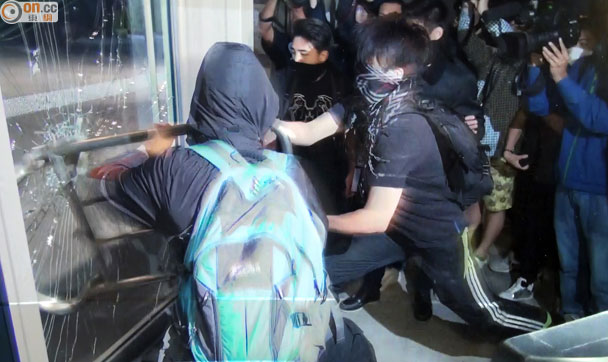
(Example: Occupy Central, 10pm
on October 15, 2014:
https://www.youtube.com/watch?v=k71Y557ZuDw.
Pro-democracy demonstrators quickly moved some obstacles onto the intersection of Pedder
Street and Connaught Road, they blocked traffic for a brief period of time, they
took videos of themselves and then they took off in a hurry before the
police showed up.)
- In Episode 22 of The Greed of Man
(40:28-40:41), Lo Wai-ling tells Ting Hai: "You have caused everybody to
wind up in this situation. Still, you continue to offer your rationales.
You only know about your reasons, and you don't care about other people's
reasons. Only your reasons are God-given, but everybody else's reasons are
rubbish. Are you really so selfish? I have never seen anyone as selfish as
you are, so unreasonable, so barbaric. I pray for the Heavens to finally
open their eyes and punish you."
(Hong
Kong Economic Journal) November 7, 2014.
Scuffles broke out at the Occupy protest site in Mong Kok late Wednesday
night after a man described by police as an “aggressive protester” provoked
officers with the flashlight on his smartphone.
Police tried to arrest him, but several other protesters
rushed over to stop them, sparking multiple rounds of confrontation, Ming
Pao Daily reported Friday. Eventually, police issued warnings and used
pepper spray to disperse the crowd. Police said they arrested four people.
Chan Shu-fai, convenor of the police powers
monitoring group of the Civil Human Rights Front, said he contacted the four
people who were arrested and found that two of them were injured. Two other
people who were not arrested were also injured, Chan said. One of them
suffered a serious injury to his left leg and couldn’t walk. Chan said the
police not only abused their rights, but were violent in dealing with the
protesters. He said the police had also failed to explain to the protesters
why they were going to use pepper spray, thus angering the crowd.
Chief Superintendent Steve Hui of the
Police Public Relations Branch said in a press briefing on Thursday that the
police severely condemned protesters who provoked on-site officers by
directing a flashlight from their smartphones at them, hampering them in
carrying out their duties.
However, an Apple Daily report on Friday
suggested that police were the first to use flashlights against protesters.
During their attempts to clear Lung Wo Road on Oct. 15, some officers also
aimed powerful flashlights at reporters and the video cameras of television
cameramen, hampering the journalists’ work, the report said.
Video:
https://www.youtube.com/watch?v=0XJre8AYmHY (Apple Daily, November 7,
2014)
(Apple
Daily) April 16, 2015.
According to one of the policeman who was
shone upon, they were separating the pro-Occupy and anti-Occupy groups from
each other. At the time, he was facing the pro-Occupy people, and the
defendant shone a flashlight at him, causing him to be unable to see well.
But since he had to hold his position, he could only move his head to avoid
the light. At first, this policeman said that the shining continued for 10
to 15 minutes. When challenged, he changed that to 1 to 2 minutes.
The prosecutor also summoned inspector Lee
Kwok-yiu to testify. Lee said that he observed the defendant shining a
flashlight at his colleagues. Although the policemen did not complain to
him, his professional judgment was that the defendant was obstructing police
business. The defendant also called upon other demonstrators to do the same.
Lee said that he warned the defendant. The police tried to move in to make
an arrest, but the defendant fled. On November 22, the defendant was
arrested in the Occupy Admiralty area.
(Ming
Pao) April 16, 2015.
In court, a police video was shown. At the
time, a policeman approached the defendant and asked loudly: "Are you
causing trouble?" The defendant replied repeatedly: "I am just shining the
flashlight at your camera, not at your colleagues." At the suggestion of
other demonstrators, the defendant turned off his flashlight for a while.
Then he turned it back on again. A policeman said aloud: "You are shinning
the flashlight at my eyes!" The defendant replied: "I am shining at your
arse?" Then he said excitedly: "I am indeed shining the light at you! Are
you frustrated?" Finally Lee issued an warning to the defendant.
(The
Standard) Police take dim view of flashlight. April 17, 2015.
Waiter Ken Lo
Kin-man denied two charges of obstructing police when he pointed his mobile
phone flashlight at four officers. Kowloon City Magistrates' Court heard
that 28-year-old Lo turned his flashlight on the officers on November 5 last
year at the Mong Kok protest zone on the junction of Nathan Road and Argyle
Street.
Deputy Magistrate Lam Tsz-kan questioned
whether the charges are valid because the police cordon did not move forward
during the protest. Even if Lo pointed the device at officers, would it have
obstructed them in their duties, Lam asked.
The prosecutor replied that a 40-second
flash would be sufficient to do so, and advice had been sought before the
charges were laid. In a video clip played in court, Lo claimed he was
pointing at a police camera, not the officers.
Inspector Li Kwok-yiu said he saw Lo flash
the light at his colleagues, adding the action could dazzle officers making
it difficult for them to execute their duties. Li said he warned Lo that he
would be arrested. But when questioned by the defense as to whether the
flashlight affected him, Li said it didn't as he was standing at the rear of
the cordon. However, he saw some of his colleagues turn their heads aside to
avoid the light. When Li tried to arrest Lo after his final warning, he
failed to do so because he was hindered by the crowd.
Lau Ming-lun, a police officer at the front
of the cordon, said the light temporarily blinded him but he could not walk
away. The hearing continues today.
(Cable
News) April 17, 2015.
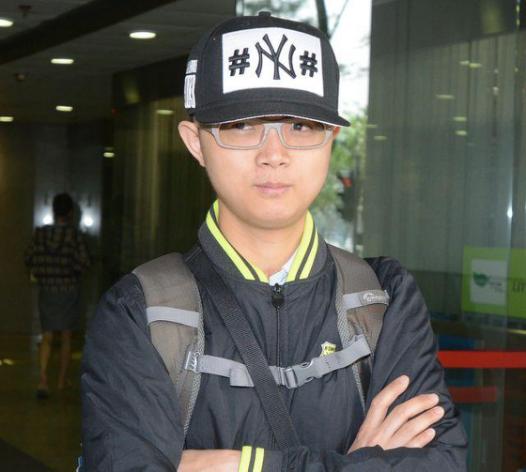
28-year-old Ken Lo Kin-man showed up in
court yesterday wearing a surgical mask. The magistrate found him not
guilty. When Lo walked out of court, he took off his surgical mask and told
the press that he was satisfied with the verdict. He also said that he
concurred with the magistrate's criticisms.
The defendant was alleged to have used a
smartphone flashlight twice to deliberately interfere with police operations
in Mong Kok on November 5, 2014. He was arrested and charged with two counts
of interfering with police business. Magistrate Lam Tsz-kan pointed out that
the actions of Lo Kin-man were unnecessary, uncivilized and provocative. As
such, the actions created inconvenience for the police officers on duty.
However, Lo was only using the flashlight on an ordinary mobile phone for a
brief period of time. On one occasion, he was somewhat far away (note: 1.5
meters) from the police officers. Therefore, Lo did not affect the police
for a long period of time. The magistrate said that at the time, the police
were keeping two different groups of demonstrators holding opposite opinions
apart, and they were stationary at the time. Therefore, the actions of the
defendant did not interfere with police duties. Accordingly, the magistrate
found the defendant not guilty. The defendant was released immediately.
(Ming Pao via
Speakout HK) By Chris Wat Wing-yin. April 19, 2015.
I have always believed that the great thing
about our town is the excellent rule-of-law.
I have always thought that our island is
better than the Grand Nation on account of the perfect legal system.
Over the past few months, I have seen case
after case ended up as withdrawal of charges, or suspended sentences, or
community service, or not guilty ... the various law-breaking activities
during Occupy Central are going unpunished. One after another, lawbreakers
are returning to society scot-free with the blessing of the judges. Nobody
needs to pay any price for 79 days of destruction. Nobody is punished. The
blind goddess was never about fairness or justice. The goddess simply
doesn't want to witness what is transpiring.
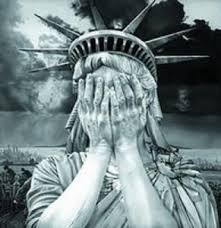
In another recent court, case, the
28-year-old waiter used a mobile phone flashlight to shine at two police
officers on duty. He was charged with interfering with police business. The
magistrate said that the defendant used ordinary lighting equipment to shine
ten seconds at two policemen who were standing still. Therefore, this was
not interference with police business. The magistrate found the defendant
not guilty.
If a student were to shine a mobile phone
flashlight at the teacher for ten seconds during class, do you think that he
would be punished? Definitely. It does not matter how long the shining
lasted, because the action was offensive.
If a citizen were to shine a mobile phone
flashlight at this magistrate for ten seconds in court, do you think that
this citizen would be allowed to leave?
The issue is not about the 10 seconds. It
is about the action itself. This time, someone shined a flashlight on a
law-enforcement agent. Next time, someone else is going to blow a whistle
next to his ear. How do you expect the police to enforce the law?
The policeman in uniform stands for the
law. If you offend him, you are offending the law. One second is already
offensive, and ten seconds is obviously provocative.
I don't know much about the law. After
reading about these recent court cases, I understand the law even less. I
thought that justice was written in black-and-white. But in the end, it
turns out that some magistrate comes out to interpret justice. We can no
longer scorn at the mainland courts for their rule-of-man. We may have a
sophisticated legal system, but in the end some guy just says, "Release the
defendant" and that's that.
(Post852)
April 19, 2015.
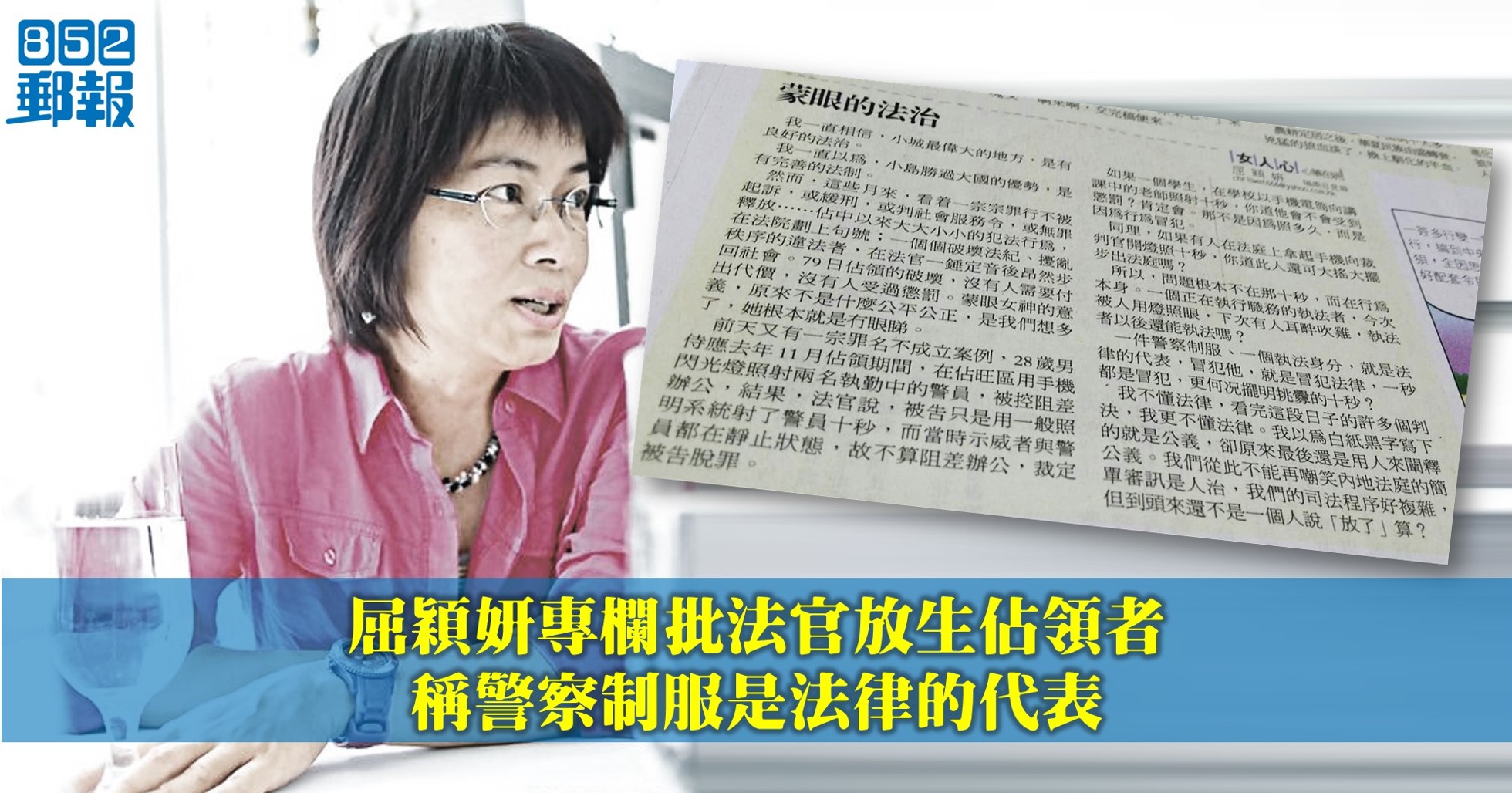
Wat Wing-yin is so wrong!
First of all, it is not against any law to
shine a flashlight at a teacher in class;
Secondly, shining a flashlight at a judge
in court is contempt of court; shining a flashlight at a policeman is not
against any law given that we don't have anything on the books about
contempt of the police;
Thirdly, if Wat Ying-yin had bothered to
read the magistrate's statement, she would have learned that the defendant
was not interfering with police business. At the time, the police weren't
even really doing anything (they were just looking at the crowd while
claiming to be conducting crowd control). Therefore, the defendant was not
obstructing the police. At the same time, the magistrate criticized the
defendant for acting in a provocative manner. Thus, even though the
defendant was found not guilty, there was probable cause for the charges and
therefore the defendant had to pay for his legal fees.
...
The reason why the rule-of-law is being
challenged and trampled in this town is due to poor-quality commentators
such as Wat Wing-yin. They know clearly that they know nothing about the
law, but nevertheless they proceed to spout nonsense. That is why the
rule-of-law is in trouble here.
Finally, it must be pointed out that a
uniformed policeman does not represent the law, because the police are
merely law-enforcement agents who are given certain authority under the law.
The police have been heard to say "I don't know anything about the law." How
can a group of people who know nothing about the law come to represent the
law?
The representatives of the law are the
courts and the judges. After these "representatives of the law" make their
ruling, people like Wat Wing-yin completely disrespect their decisions and
make ignorant comments. She is the one who said "offending him is offending
the law." Is she showing how to slap her own face?
Internet comments:
- What was the 28-year-old waiter trying to
accomplish by shining the flashlight at the police? Does he want the police
to leave, so that the pro-Occupy and anti-Occupy people can fight it out?
Hey, this situation isn't even one in which the Evil Police are beating the
valiant warriors of the Hong Kong City-State. The police were only trying to
keep the peace!
- When the police leave and the anti-Occupy people attack, the pro-Occupy
people will call the police uncles for help.
- Inside a court room, it is even contempt
of court to take out a mobile phone. I am not talking about shining the
flashlight at people. I am talking about holding a telephone conversation or
taking a photo.
- Is there a photo of this magistrate? I
will wait for him outside the courthouse. When he leaves work, I will rush
up and shine a flashlight into his eyes. According to this magistrate, this
may be unnecessary, uncivilized and provocative, but it is not against the
law. And I am not obstructing his work as he has just left work.
- I'll bet that he'll call the police. When a citizen is harassed, they call
the police. When the police are harassed, who can they call?
- The verdict is about right. When someone
administers a flying kick to the chest of a policeman and only gets 200
hours of community service, shining a flashlight into the eyes of a
policeman should get a not-guilty verdict.
- Was this magistrate elected by universal
suffrage? Or was he just appointed to the bench?
- I completely agree with the verdict.
Movie stars have flashlights pointed at them everywhere that they go, and
that is not a crime. So when the same thing happens to the police, it is not
a crime either.
- Next time, the police should bring a
searchlight to a demonstration site and shine it at the demonstrators at a
close distance. Magistrate Lam Tsz-kan has already said that this is okay.
- I don't want to argue with you about movie stars
or policemen. I want to know: What would you do if someone shines a
flashlight at your eyes? What would you do?
- It is wrong to shine a flashlight into
someone's eyes. The magistrate criticized the action, but he declined to
find the defendant guilty. Why? Because the magistrate has to consider the
identity of the defendant. In their eyes, the law applies only to some
people. We cannot criticize the magistrate's decision, because that would be
contempt of court. We can criticize the police though, because we have
freedom of speech in Hong Kong.
Rewind the video tape player:
https://www.youtube.com/watch?v=ufyykTsEiQM The police runs an ID check on
the individuals in the unlawful assembly on XMAS day in Mong Kok and this woman (later identified as Amy
But Wai-fan) has no ID. Due to her
intransigence, the police put her under arrest. The police woman informs her
that she is being arrested. The woman refuses to move unless the police woman
releases the hold on the arm. The police woman says that handcuffs will be used,
but the woman kept talking about releasing the hold on the arm. The woman
eventually enters one police van but was taken to a second van. The van does not
leave immediately. Now see the
follow-up news stories below.
Also: Cable TV
https://www.youtube.com/watch?v=Q1MLGO_ZCQs Starting at 6:00.
(Apple
Daily with video) December 27, 2014
On December 27, the 19-year-old woman
Amy But Wai-fan came to meet the press in the company of legislative councilor Lee Cheuk-yan,
who heads the Labour Party and the Confederation of Trade Unions. According to
her, when she entered the police van, she fell and was then pushed against the
window, leaving bruises on her arm. While in the police van, two plainclothes
police women slapped her in the face, ear and hands and cursed her out. This
lasted between 5 to 8 minutes. They threatened to file additional charges
against her if she dares to file a complaint against the police.
Amy said that she was "very scared" and
kept screaming "Don't hit me." She demanded a medical examination and asked for
the badge numbers of those who hit her. Instead, she was threatened with being
charged with assaulting police officers and interfering with police duty. She
did not dare to complain. She left after her family members brought her ID down
to the police station. Yesterday, she went to get a medical examination at the
hospital. The doctor said that she had a bruise mark on her left arm and a
swollen left ear.
Amy had been previously arrested during
the Causeway Bay clearance. She said that she joined the Shopping
Revolutionaries on Xmas Eve. Chaos broke out around midnight when someone
claimed to be "keeping guard over a bottle of milk" (Yes, that is what is
printed in the newspaper!). At the time, she was standing on the sidewalk. Amy
said that the police beating and threats were white terror. She called for more
victims to come out.


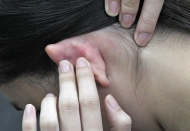
(SCMP)
Protester, 19, claims police officers beat her after arrest on Christmas Eve
December 28, 2014.
A 19-year-old pro-democracy activist has alleged
plain-clothes officers slapped her in the head until she bled as she was driven
to the Mong Kok police station just after midnight on Christmas Eve.
Amy But Wai-fan told her story to the media yesterday,
saying she had decided not to report the case to the Complaints Against Police
Office (Capo) - the force's internal investigation unit - as she had "no
confidence" in it. Her ear was still red and there was a bruise on her left arm.
But said she was one of 500 people on a "shopping tour"
protest - in which crowds walk slowly to disrupt commercial areas - on Shantung
Street. She was taken to a police car by five plain-clothes officers after she
failed to show her identity card. She alleges the officers assaulted her in the
car on the way to the station. "They slapped me three or four times … until my
ear bled," she said. "When I asked for their officer numbers, they threatened to
charge me with police assault and obstructing police work if I made a
complaint."
Comment: The existence of the above YouTube video is
not known to many people. Look at the video again and remember that the police
van did not leave immediately and hundreds of people were still milling around
when the woman was allegedly assaulted by 5 police officers in the police van for five to eight minutes.
Also, you may wonder why it was an "unlawful assembly." As Amy But said, she and
others were keeping guard over "a bottle of milk" on the road. Like dropping
coins, this is a ploy to block vehicular traffic to achieve a mobile Occupy
effect. The police will issue a warning (banner/megaphone) first, then run an ID
check if the individuals refuse to move on.
Here are some more Amy But videos.
https://www.youtube.com/watch?v=5cNAaSABfTg February 9, 2014. Amy But sings
a Beyond song. Really awful singing. Really.
https://www.youtube.com/watch?v=etxh0ZnIA_U On October 18, 2014, Ming Pao
had a video featuring Amy But teaching people how to use thick iron wires to
reinforce the wooden pallets used in street barricades.
https://www.youtube.com/watch?v=Iw9ggo8Uzjg On November 24, 2014, Amy But
was interviewed by radio channel DBC about what happens after the forthcoming
Mong Kok clearance.
(Amy But) We are thinking ... If they come to clear the area, we will assist the
bailiffs to carry out the court order. We will pack up our own stuff materials
and move elsewhere. So we will not clash with the police. We will directly
follow their directions. We will leave.
(Male reporter) On the day before yesterday, the Occupy Central trio announced
that they may voluntarily leave after the beginning of December. How do you look
at this?
(Amy But) Eh, if they leave, they leave. We, the power of the people, will not
leave until we win the hearts and minds of the people. Eh, if we have this
determination, it doesn't matter if they leave.
(Male reporter) Do you think that are splits within the Occupy Central trio, the
Federation of Students and Scholarism?
(Amy But) Eh ... so it is. There are some splits. Because at the start, they led
us to occupy areas. They announced class boycotts. Occupy areas. Until now. They
have never come out to Mong Kok to see us.
https://www.youtube.com/watch?v=dfMXdEnbmG8 On December 24, 2014, Love Hong
Kong held a rally in Mei Foo. A number of counter-protestors showed up,
including Amy But.
1:08 (Amy) Trash! Trash! Trash! No conscience!
1:18 (Amy) What are you filming? What the fart is this to you? Trash! Trash!
Trash! Trash! I have freedom of speech. Trash! Trash! Trash! Trash!
https://www.youtube.com/watch?v=YMfumJKxZEw On February 9, 2015, a case of
theft of a iPhone 4S in which Amy But is suspected by the police.
https://www.youtube.com/watch?v=WN1x-MSS2Yk On February 28, 2015, Amy But
leads the slogan chanting by Shopping Revolutionaries on Sai Yeung Choi Street
South, Mong Kok.
Fast forward:
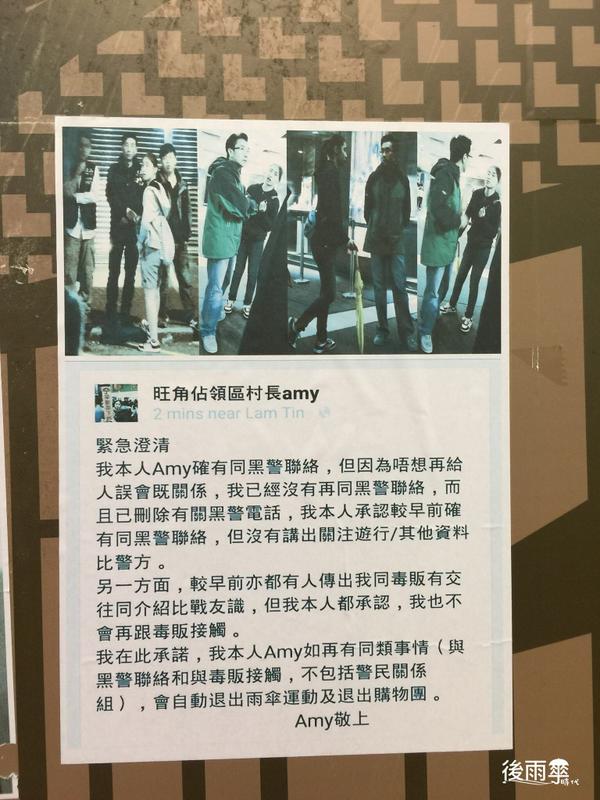
From Occupy Mong Kok village mayor
Amy:
Urgent clarification
I, Amy, did have contact with the
Evil Police. But because I don't want people to misunderstand, I am no longer in
contact with the Evil Police. I have deleted the telephone numbers of the
relevant Evil Police. I admit that I had contact with the Evil Police earlier,
but I did not provide any information about the demonstration and other matters
to the Police.
Furthermore, someone said that I
was associated with drug dealers and I introduced fellow warriors to them. I
admit that, but I will no longer have contact with the drug dealers.
I promise here that if anything
like this happens with me Amy again (having contact with the Evil Police and
drug dealers, but not including the Police Public Relations Branch), I will
automatically withdraw from the Umbrella Movement and the Shopping Revolutionary
Group.
Respectfully, Amy.
P.S. I have met with my Yellow
Ribbon lawyer and will go through the legal process to sue the Evil Police for
misbehavior and criminal assault! In the Umbrella Movement, I am a victim. I
will not communicate with or pass information to the Evil Police. This applies
to those policemen that I got to know in the Occupy zone.
I have contact with the Police
Public Relations Branch because I want to make applications in the future to
hold peaceful demonstrations! Do not forget our original intentions! Let's fight
for genuine universal suffrage.
Video: SocREC Rio Kwan
https://www.facebook.com/socrec/videos/1124159597610970/, (
https://www.facebook.com/HKUmbrellaRevolutionGeneration/videos/545082775629939/?fref=nf
https://www.facebook.com/permalink.php?story_fbid=755619501220405&id=397730460342646
)in which Amy But reads her statement but she is completely drowned out by
demonstrators who yelled at her for being a police informer.
Internet comments:
- When the Shopping Revolution
first started, I told people to be wary of this woman. At the time, the
fellow revolutionaries thought that I was being paranoid ...
- "I promise here that if
anything like this happens with me Amy again (having contact with the Evil
Police and drug dealers, but not including the Police Public Relations
Branch)." What's the difference?
- Here is the photographic
evidence - Amy But speaking with the police pigs.
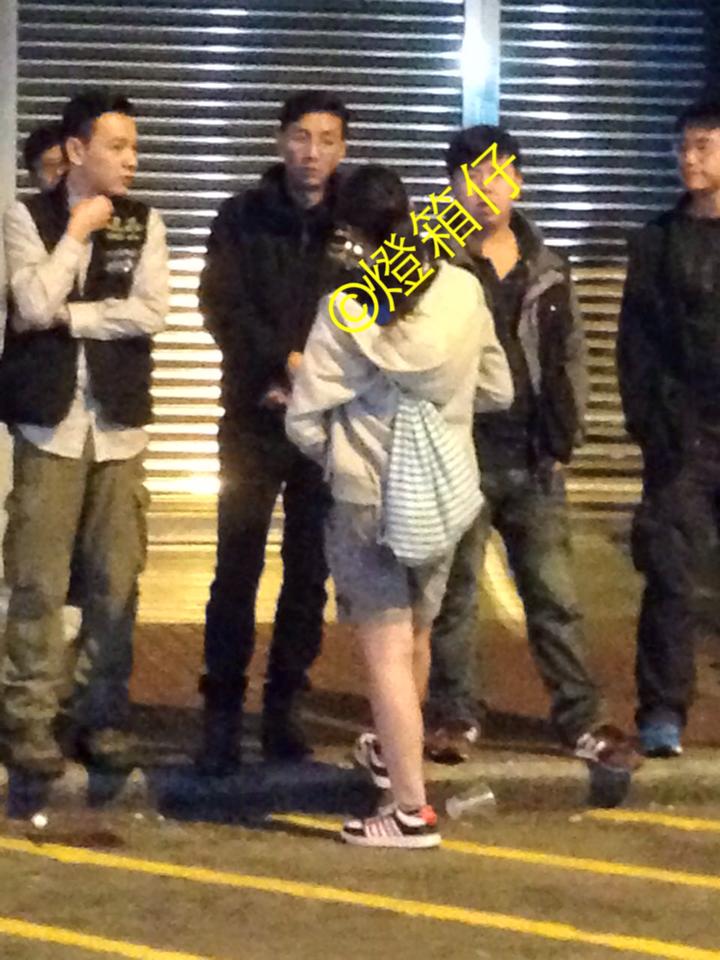
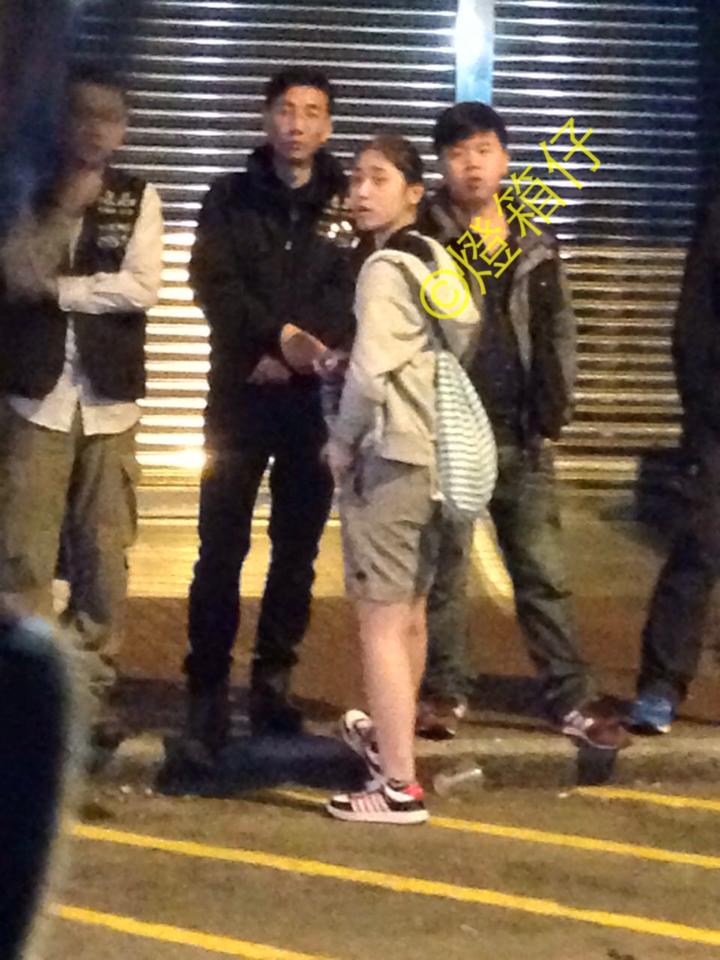
- This is not an "urgent
clarification." This is a "confession."
- She funneled information to the police and she bought/used drugs.
Therefore she is being booted out of the Shopping Revolution.
- She sold us out a long time ago.
- No, I am convinced that she is an undercover policewoman.
- It is one thing to rat us out to the police, but to connect us with drug
dealers?
- I have seen her speaking to police officers right in front of us. Even the
stupidest person would know not to divulge the relationship in public! She
is just a fool. She is unlikely to be a police informer.
- Get lost! Fuck your mother, Miss But!
- She's a People Power
supporter (see photo of her with Legislative Councilor and League of Social
Democrats member Leung Kwok-hung and People Power member Tam Tak-chi). Therefore,
it is only expected that she would be a police informer.
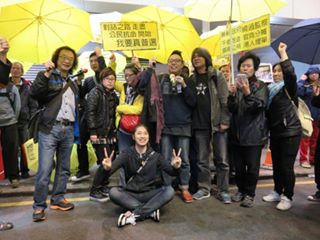
- Not so. During the Occupy Mong Kok period, the organizations took pity on
her, gave her supplies and let her speak. But she wanted to show off and she
is a natural born traitor. So she betrayed every single organization. For
example, she hung around the People Power tent but she also helped Civic
Passion to dismantle the People Power tent in Mong Kok.
(Oriental
Daily) January 27, 2016. (Wen
Wei Po) May 16, 2016.
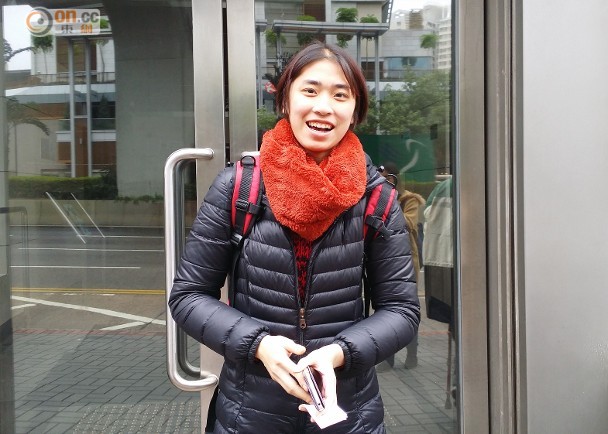
On the night of January 5th last year, a
female Sai Yeung Choi Street South store owner named Chan Yukwun woman put
her iPhone 4S on the store shelf for recharging. Shortly afterwards, the
mobile phone disappeared. The
woman used a different phone and the Find My iPhone app to send a message to whoever had the phone. The
reply message said that unless the original owner pays $3,400, the phone
would be tossed away. The owner agreed but called the police afterwards.
When the owner went the Kwai Fong MTR station on the night of January 7 to complete the transaction, the police arrested Amy But Wei-fun.
In a recorded statement to the police, Amy But said that she found the
mobile phone in the MTR system, but she forgot the exact location. She
denied that the return of the mobile phone included conditions.
Today, Amy But appeared in
Kwun Tong Court to face a charge of extortion. She pleaded not guilty.
During the hearing, the magistrate scolded the prosecution for not being
prepared (such as providing the screen captures of the messages between the
owner and the extortionist). At that point, Amy But laughed. The magistrate
scolded her: "Very few people are so happy at being prosecuted." He also
told her to stand up straight.
Outside the court, Amy But
told the press that the amount of $3,400 was merely a codeword to confirm
the identity of the owner and she had no intention of accepting the money.
Why didn't she bring the
mobile phone to the police? She said that she is a Yellow Ribbon and
therefore she doesn't trust the police.
(Oriental
Daily) May 16, 2016.
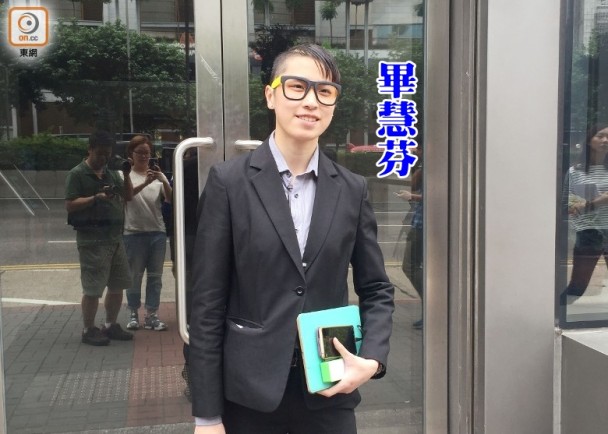
Today, Amy But pleaded guilty
to extortion. Her lawyer explained that his client had a development problem
such that her brain was retarded and she has cognitive impairment and low
intelligence. In this case, she was tempted by greed to commit the crime.
The judge considered the fact that Amy But had no prior criminal records and allowed
her to be bailed out until the sentencing on May 30 pending the report from
the probation officer.
- (Wen
Wei Po) May 16, 2016. The defense made certain claims. The
20-year-old defendant is a probationary real estate agent. She committed the
crime out of greed and opportunism, and now regrets her action. The lawyer
said that the defendant was plagued by slow development of the brain. Three
years ago, she was found to have epilepsy but she did not take medicine and
therefore could not put her disease under control. Afterwards, the doctors
diagnosed her with cognitive disability. The lawyer also has difficulty in
communicating with her. The defense presented a letter from a charity
organization to prove that she has frequently participated in volunteer
work. The defense also said that the defendant has recently enrolled in a
security guard training course. Therefore, she hopes the court will impose a
lenient sentence so that she can rehabilitate herself. The defense also said
that extortion cases often involve triad gangs and threats of physical harm,
so the present case is not as serious by comparison.
- (Sing
Tao) May 30, 2016. On the scheduled sentencing date, the probation
officer did not recommend community service, because Amy But was stubborn
and not truly remorseful. Amy But disputed certain contents of the probation
report, and her lawyer applied to have another report and a new medical
examination report. Amy But said that she has to ask her mother to find out
about what happened on previous visits to the doctor. The magistrate said:
"You are an adult. You need to be responsible for yourself. Are you still
going to rely on your mother when you reach 30? You need to take responsibility
for what you did." The magistrate postponed the sentencing until June 13 for
more reports.
- (Sing
Tao) June 13, 2016. The probation report said that the defendant was
uncooperative and unresponsive, insisting that she knows nothing about the
case. She also
cursed out the probation officer with obscene language. The defense pleaded
that the defendant suffered from underdevelopment of the cerebellum since
she was 5 months old and the doctor thinks that she suffers from ADHD
(Attention Deficit Hyperactivity Disorder) and diagnosed that she has
sub-normal intelligence. The defense said that the defendant is due to take
the real estate agent test at the end of this month, and pleaded for the
magistrate to give her a chance for rehabilitation. The magistrate said:
"How can I give a chance to somebody with such a bad attitude?" The case was
postponed until June 24.
- (Oriental
Daily) June 24, 2016. The defense pleaded that the defendant has
been detained for more than a dozen days already and has written a letter to
claim that she has reflected profoundly and decided to become a new person
in order to repay her parents who had been harrying around on her behalf.
The defendant spoke in court, and cried that she is very remorseful and
promised not to break the law again. Tonight she will be taking the real
estate agent test and hopes to procure work to repay her parents.
The judge said that the case
is serious enough normally to impose jail sentence. But the situation is
special here, because the defendant has low intelligence with lousy skills
in expression and learning. This is her first offense, so the judge
sentenced her to four months in prison suspended for 3 years.
- With respect to the Mong Kok
riot on Lunar New Year's Day 2016, here is the person suspected to be Amy
But Wai-fun:
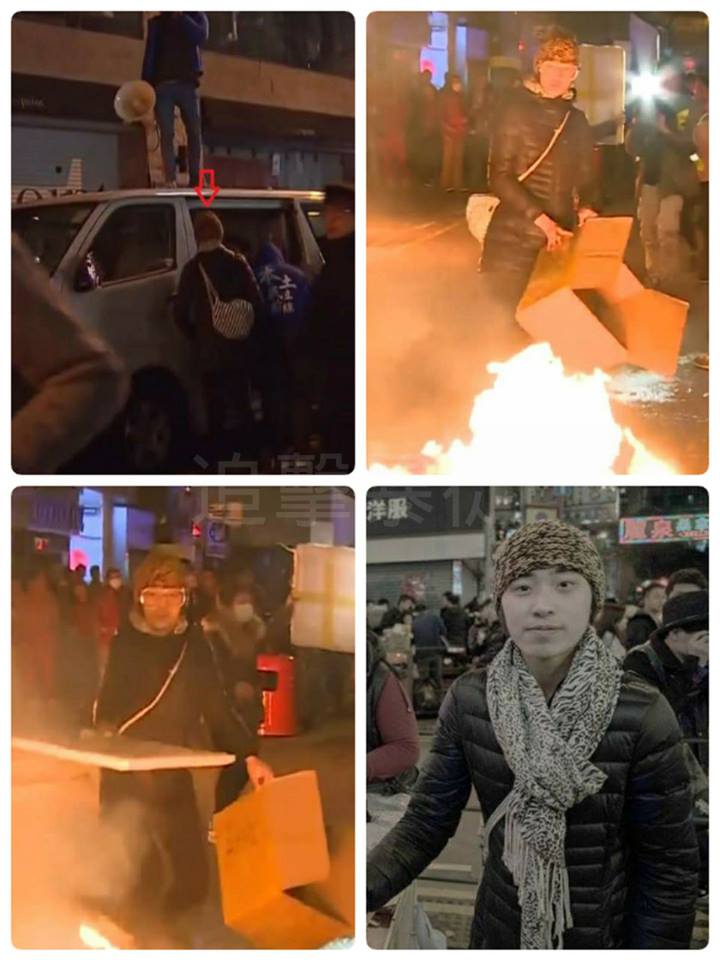
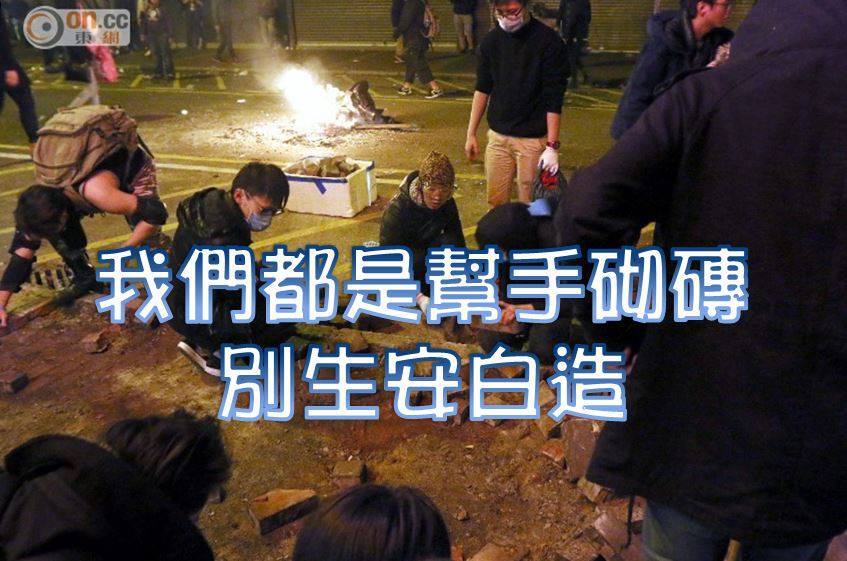
- (Oriental
Daily) July 7, 2016. The Organized Crime and Triad Bureau arrested a
20-year-old woman named But at Wang Ching House, Cheung, Wang Estate, Tsing
Yi district. She is suspected of "participation in a riot". The police
removed certain evidence, including clothing, goggles and towel. The police
had reviewed the surveillance videos taken in Mong Kok and determined that
the suspect had ripped bricks off the pavement to be used to throw at the
police. The arrestee shouted slogans as she got taken away.
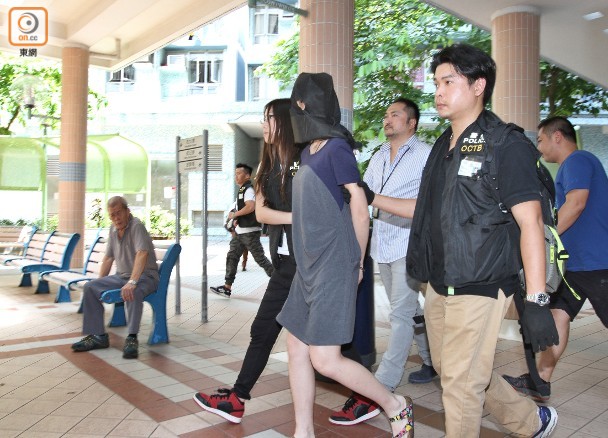
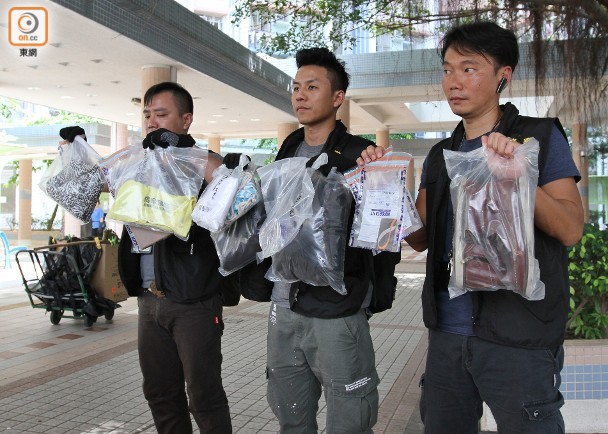
Video:
https://www.facebook.com/HongKongGoodNews/videos/1139651872775414/
- What was she shouting about when she was led
away? "I want genuine universal suffrage! I don't want any pre-screening!
The law should be solemnly enforced!" Of course. In what way of manner does
throwing bricks have to do with this 'genuine universal suffrage'?
- Well, if she can't find a reason out of
this, she can always plead 'mental retardation' as before.
(Oriental
Daily) February 12, 2017.
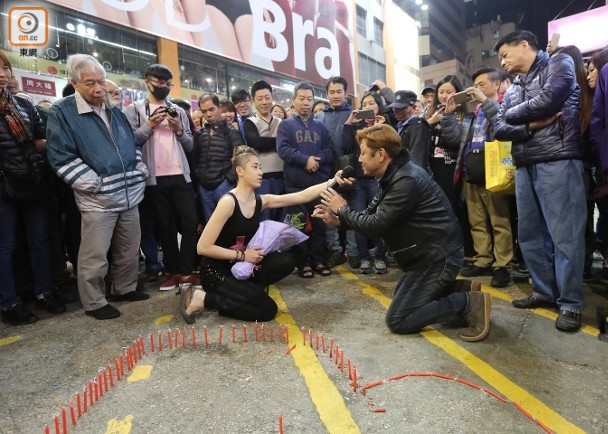
At 8pm tonight, 21-year-old Amy lit up several
dozen red candles in the shape of a heart and proposed marriage to her
boyfriend who is 30 years older. Because of the recent arson in the MTR,
some citizen called the police to say that someone has set up a fire in
public. The police came and put out the candles. So Amy had to propose
without the candles. Fortunately, her boyfriend accepted her proposal.
Freelance worker Amy said that her parents and
friends all opposed her dating a man who is 30 years older than
her. She is making a public marriage proposal to declare her intentions.
According to the government news service,
there was a report to say that someone has set off a dangerous fire at 48
Sai Yeung Choi Street South. Two fire engines went out to put out the fire.
The case was classified as a non-malicious false alarm.
(Oriental
Daily) August 24, 2017.
21-year-old Amy But Wai-fun was arrested on
suspicion of stealing $300 in cash from the donations box of street singer
Tong Cheuk-fan on Sai Yeung Choi Street South. Today, she was brought to court.
The magistrate approved $2,000 in bail for her so that she can have some
time to seek legal advice. The defendant said that she is still unemployed
and wanted the magistrate to lower the bail. The magistrate said that the
court was not a place for haggling and turned her down.
(Oriental
Daily) September 6, 2017.
21-year-old unemployed Amy But Wai-fun was
charged with stealing a mobile phone valued at $200 at a McDonalds
restaurant in the Good Hope Building, Sai Yeung Choi Street South, Mong Kok
district. The prosecution that the defendant is hospitalized at this time,
so the magistrate postponed the case to September 11 for the next hearing.
In the meantime, the defendant will remain in police custody.
(Oriental
Daily) September 7, 2017.
Amy But Wai-fun's application for bail was
rejected and the next hearing will be held on October 10.
(Oriental
Daily) October 11, 2017.
Street singer Tong Cheuk-fan testified that he
was singing on Sai Yeung Choi Street South on August 20. While he was
performing, he spotted the defendant Amy But Wai-fun dancing at first,
inching near the donation box and reached out her hand to pull out $100
notes. The defendant tried to leave the scene. Tong relied on clutches and
cannot give chase. Fortunately other customers intercepted the defendant.
Tong reported to the police. Afterwards he found out that he was missing at
least three $100 bills.
The defense questioned whether Tong
misunderstood the action because the defendant was trying to put money into
the donations box. Tong said: "I wish that were so" and "nobody makes a
donation that way."
The prosecutor said that the police found
three folded $100 notes in the defendant's hand. The defendant said: "This
is a misunderstand. I was just passing by. I have no idea what happened. I
lost my wallet. I have no identification."
(Oriental
Daily) November 13, 2017.
Previously, 21-year-old Amy But Wai-fun had
pleaded guilty to one count of theft of a $200 mobile phone. Today, she
applied to overturn the guilty plea because she intends to hire another
lawyer. She said that when she appeared in court on September 15 for a
review of bail, a foreigner lawyer persuaded her to plead guilty. The
defendant claimed that she was diagnosed as mildly mentally retarded and did
not understand the issues. Furthermore, she had a case of the flu at the
time. So she was "induced" to plead guilty, but now regrets that decision.
The case was postponed until November 23. Meanwhile the defendant will
remain in custody.
(Oriental
Daily) November 14, 2017.
Today 22-year-old Amy But Wai-fun was found
guilty of theft. She burst into tears upon hearing the verdict. The
magistrate will wait for the background and psychologist's reports before
sentencing on December 5. The defendant is remanded into custody until then.
The prosecution said that the
defendant has a prior conviction and therefore this new crime is a violation
of the terms of probation.
The defense pleaded that the
defendant was a victim of domestic violence as a child and is estranged from
her parents. She was diagnosed as a case of moderate mental impairment while
in middle school. The defense pleaded for a leniency.
(Oriental
Daily) December 5, 2017.
When she met with the probation
officer and the psychiatrist, she admitted openly that she has been a drug
addict since last year, taking more than one kind of drug. The magistrate held
sentencing back to December 19 pending reports from the drug rehabilitation
center.
The probation officer said that
she has a strong likelihood of recidivism. But the defense said that jail
would be of no help to her and sought counseling for her instead.
(Oriental
Daily) December 19, 2017.
The magistrate said that the
drug rehabilitation center reported that Amy But is no longer an addict.
Therefore she should not be kept at there.
The magistrate said that the
sentence will be as be as light as possible given her youth. The magistrate
told Amy But to value the opportunity and avoid bad influences and drugs in
future. The defendant said: "I understand. Thank you, your honor."
The magistrate sentenced Amy But
to 14 days in jail for the theft of $300 from the street musician. Previously
Amy But had been sentenced to 4 months in jail suspended for 3 years for
extortion. The suspension is removed as a result of the new conviction.
Therefore she will have to serve 3 months of that suspended sentence. In
total, Amy But will have to serve 3 months 14 days in jail.
During the hearing, a citizen
walked into the court and wanted to present a letter of petition. The
defendant said that she does not know this person and refused to accept the
petition. She asked the security guards to expel the person. But the citizen
was allowed to stay.
(Oriental
Daily) December 20, 2017.
Previously Amy But Wai-fun had pleaded guilty
to stealing a mobile phone valued at $200 at a McDonald's
restaurant in the Good Hope Building, Sai Yeung Choi Street South, Mong Kok
district. Today was sentencing day.
Amy But did not have a lawyer.
She said that she will not be a repeat offender and she wants to serve her
time and come out to take care of her ill mother. She pleaded for a reduced
sentence to be served concurrently with her other jail sentences.
The magistrate Peony Wong
Nga-yan said that the starting point of this case of theft was 12 months. The
defendant pleaded guilty but not from the start. Therefore she is only
entitled to a 1/4 reduction. The jail term is therefore 9 months to be served
separately. Together with her 3 months 2 weeks, her total jail time is now 12
months 2 weeks.
(Bastille
Post) April 19, 2019.
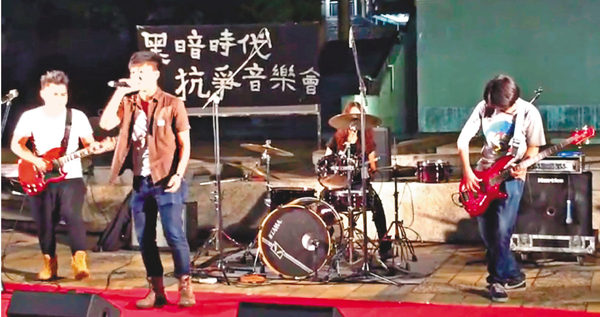
A friend sent me a YouTube link:
https://youtu.be/d2T51_g88Mo .
This is a video of a Lingnan
University music concert with the title of "Blood & Sweat Attack - salute to the
Hong Kong Police: Fuck The Police." The video covers 3:35 of a song whose lyrics
are just swearing at the police. The phrases "Damned policeman, fuck your
mother" and "Do you have special privileges? Are you fucking overbearing?" I was
amazed with this video.
The comments section was a battle
ground between Yellow Ribbons and Blue Ribbons. Nevertheless some people at
least tried to comments with a little bit of detachment. For example, the
commentator Jojo wrote: "People will have to grow up eventually. The worst fear
is that when you do wake up a few years later, you find that you missed a lot
that you couldn't catch up anymore. This is a standard way for the weak and
vulnerable to show their discontent. But the problem is that what do you change
as a result of this? Instead of staying weak and vulnerable, why don't you make
yourself strong and powerful? Then you will have the ability to change society.
Today, you are 20 or 30 years old and you have a dozen of so audience members
listening to your song. By the time that you are 30 or 40 years old, nobody is
going to listen anymore. Young men, you should treasure your time. You should
strive and learn to become strong and powerful. When that time comes, you can
change anything that you want. The students appreciate you now, because they
know that you are not qualified to compete with them. Your competitiveness is
pathetically poor. This cannot be your sole choice for existential value. You
don't need to make a fool of yourself like this. You should strive harder."
Internet comments:
- Lyrics
Fuck the police. The police are
running wild.
When I see them, I wish that they drop dead. May their entire family die.
The reputation of the Police was ruined by these damned policemen
You defecate you defecate. You drop on the ground and you blame it on the soil.
If you take a video, they will bark; if you shine a camera light, they will
break your leg.
You ass-lickers, you are so pompous.
Many people want to uncover your background, invite your mother for a chat as to
why she didn't use a condom when she fucked and you came about as a result.
She would be better off having a prostitute daughter instead instead of having
your as a tortoise son.
Everybody can see that only hooligans join the police force.
Don't tell me. If you are in trouble, don't call the police.
It is the duty of the police to protect the citizens,
but the police beat up the citizens. The law enforces knowingly break the law.
Therefore these evil policemen should be executed immediately.
If they openly beat people up in a dark corner without suffering any
consequences.
The Hong Kong Communists call this rule-of-man, the police lead the way to
destroy rule-of-law.
Damned policemen, fuck your
mother. (repeat 8 times)
Do you have special privileges?
Are you fucking overbearing?
Damned police!
Damned policemen, fuck you mother.
(repeat 8 times)
- Young people in Hong Kong are in
despair because they know that they will never be able to buy an apartment given
their salaries. Without an apartment, they will never be able to get married and
have kids. However, singing a few more refrains of "Fuck the police!" isn't
going to bridge the gap.
- These young wastrels think that
they are so awesome. They contribute nothing to society except to write songs to
curse out the police. If the police were to vanish for 24 hours, these young
wastrels won't dare to walk the streets because angry citizens will thrash the
hell out of them. The only reason why this hasn't happened is because of police
protection. When they sing songs like these and get challenged by the Blue
Ribbons, what do they do reflexively? They dial 999 to summon the police uncles
to protect them. When the police take longer than 3 minutes to appear, they
whine about the slow police response time.
- You piece of Blue Ribbon shit! You should go back and keep working your tail
off to pay off your mortgage.
- FUCK THE POLICE
FUCK HK GOVERNMENT
FUCK THE CCP
FUCK EVERY FUCKING CRAZY CHINESE
- You forgot: D7689 (=Fucking fuck CY Leung!)
- The Hong Kong police canines eat shit!!!
- Brothers unite! Let's fuck the police and their mothers together!
- What kind of university student
music concert is this? If these people are the future pillars of society, we are
all fucking screwed! We are better off with the elite education of the British
colonial era than the more open education system today.
- Just rubbish. They think that
they look swell, but their lyrics are just dreadful. They just want to release
their steam on somebody else. Why do you want to pick on the policemen's
mothers?
- Freedom of speech is at stake
here. There is nothing wrong about saying FUCK YOUR MOTHER! There is no
law against that. Just go to any construction site, and the construction workers
say that all the time.
- Yeah, I watched the video and I
listened to the lyrics carefully. This song is just a stream of invectives. It
is content-free. You know what the fuck I'm saying. Like you know. Yeah. You
know.
- Someday these guys are going to
have to leave school (even if they don't earn a degree) and find a job. Let's
hope their prospective employer finds this video.
- For the academic year 2013/2014,
the Hong Kong University Grants Committee gave a total of $15,386,500,000 to the
eight universities. This money comes from the taxpayers of Hong Kong. It is
lovely to to see that some of the money enables Lingnan University students to
hold music concerts like this one.
- Long live freedom of speech!
- What is so big deal? Here is
NWA's Fuck
Tha Police. In America, they have freedom of speech to say Fuck Tha
Police. So can Hongkongers.
- The American police shoot unarmed citizens
all the time (see, for example,
South Carolina).
Should the Hong Kong Police be allowed to do the same? You know, international
standards.
- (SCMP)
May 2, 2015.
The president of Lingnan University's
student union has refused to rule out use of foul language at events after
he was criticised for letting a band sing a rap song at a union concert last
month that contained abusive lyrics about the families of police officers.
Following the performance, Philip Lau
Chun-lam was warned by the university's president Professor Leonard Cheng
Kwok-hon that he could be kicked out if he "damages the university's
reputation" again.
Lau received a warning letter from Cheng on
Thursday which said the song had condemned the police "with a barrage of
foul language" which was "in direct contravention of the university's core
values, which call for the cultivation of personal virtue and respect for
others".
A video of the band singing the song, which
shares the name of a popular 1980s song by American rap group NWA, has been
viewed more than 93,000 times on YouTube.
Cheng said the university's student
disciplinary committee may take action against any student who undertakes
acts "detrimental to the reputation and well-being of the university".
University regulations stipulate that the
most serious punishment for such an offence is termination of a student's
studies.
Lau told the South China Morning Post
that "the student union has no plan to organise a similar concert again …
but I cannot guarantee that our future concerts or forums will be free of
foul language".
Lau insisted the performance had not
created any major problem and that it had suited the concert's theme, which
was billed as "Resistance in a dark age". He also said Cheng only took a
hardline approach after he was pressured by the university's council on
Monday.
In a statement from the student union on
Thursday, a spokesman accused Cheng of being a supporter of Chief Executive
Leung Chun-ying "who only cares about the voices of government and those of
the powerful and privileged". Cheng was an adviser to Leung's election
campaign.
Since pro-Beijing newspapers Wen Wei Po
and Ta Kung Pao first reported on the concert on April 20, the
university and its student union have faced a barrage of criticism from
Beijing loyalists including former Law Society president Junius Ho Kwan-yiu.
- (EJinsight)
April 30, 2015.
Hongkongers have enjoyed freedom of expression, protected by the law, for
decades. But as hostility grows between the pro-democracy and pro-Beijing
camps after the electoral reform plan for 2017 was announced, people are
increasingly using foul language and drawing criticism for it.
However, there seems to be no consistent
standard regarding the public use of foul language.
Police officers were often heard saying
“f**k off” to those taking part in the Occupy campaign last year, so why are
people now pointing fingers at a band for using foul language to condemn the
police in a song performed at Lingnan
University?
A local
group immediately called for the arrest of the members of Sweat and Blood
Attack, the performers of the song, F**k the Police, for breaching the Public
Order Ordinance. It also urged the university to dissolve the student union,
which organised the performance.
Why did the band condemn the police with foul
language? The growing discontent with the police is the result of their
failure to maintain a neutral stance when performing their duties during
public demonstrations. Many feel that while the police used violence against
peaceful protesters, they allowed pro-Beijing loyalists to go undisturbed.
Against this backdrop, it is quite clear why
the students and young people hate the police so much, especially as seen in
their postings on social media. The police still earn the public’s respect
when they perform their duties properly. But it is certain that Hong Kong’s
police are no longer heroes to the public, at least among young people.
In fact, singing a song condemning the police
with foul language is not something new. An English version of the song “F**k
the Police” was recorded by the American rap band N.W.A in 1988, helping to
raise people’s awareness of police brutality. When the song was released with
famous rapper Dr. Dre as producer, it caught the FBI’s attention because of
its inflammatory lyrics. It became more popular after many rock bands,
including Rage Against the Machine (Live & Rare album 1997), covered the
songs.
Hong Kong’s Progressive Lawyers Group said
performing a song containing foul language in a campus concert cannot be
characterized as acting “in a disorderly manner”. “We also cannot see how the
persons concerned had allegedly acted “with intent to provoke a breach of the
peace,” the group said in a press release. “Therefore, we are of the view that
Section 17B of the Public Order Ordinance (Cap. 245) does not apply to this
incident.” The group said people with different opinions are now less tolerant
toward one another and want to try to silence their opponents. The latest
trend is that Beijing loyalists are implementing a new round of political
struggle against the opposition camp to try to keep their mouths shut.
Despite such “Cultural Revolution-style”
criticism, even if certain songs or written articles contain foul language or
“curse words”, it does not necessarily mean that people who create, publish or
perform such songs or articles will thereby have breached the Public Order
Ordinance, the lawyers’ group said.
- (Oriental
Daily) May 3, 2015.
At the RTHK City Forum, Lingnan University
Student Union President Henry Lau said that the musical concert was an
occasion for students to express their dissatisfaction with the government.
Therefore society should not be focusing solely on the foul language, but
instead should also be thinking about the underlying reasons. That is,
citizens are unhappy about not being able to achieve anything against an
unjust regime and are therefore using non-mainstream methods to resist.
New Territories Concern Grand Alliance
spokesperson Ho Kwun-yiu said that the song not only contained foul language, but
it was also threatening and insulting in substance. Ho said that this was not
just about somebody's personal conduct but it was verbal violence. Ho said
that personal freedom should not go beyond social expectations on behavior.
Cultural critic Tang Siu-wa said that the
obscene song did not incite citizens to disturb social peace. Tang said that
it was an expression of opinion that does not violate any laws, therefore it
is not a crime.
Ho asked Lau and Tang multiple times to read
out the song lyrics. Afterwards, Ho said that he did so in order to test
whether these two had the guts to go live on air to show what they said were proper
things to do. Lau said that he felt threatened by Ho's behavior which he
considered to be improper.
- You say I am improper. I say you are
improper. We are all improper then.
(SCMP)
University of Hong Kong plan to enforce student visits to mainland China sends
ripples across campus. April 19, 2015.
A policy under which University of Hong
Kong undergraduates will spend time on the mainland as part of their degree
has sent ripples across the campus amid fears some students will lose out.
The policy, to be introduced in phases until 2022 and which may be
mandatory, was revealed by HKU vice-president Professor Ian Holliday at a
dinner with the student union on Friday.
While some education figures backed the
plan in principle, there were concerns about the impact on students unable
to visit the mainland. Some of the 220 students at the dinner said Holliday
told them all undergraduates would have a "mainland experience".
"I was shocked to hear about it," union
president Billy Fung Jing-en said. "Our main concern is his wording. He said
'If you don't agree with the policy, then please don't come to HKU'." But
education-sector lawmaker Ip Kin-yuen and HKU law Professor Simon Young Ngai-man
were broadly in favour.
Holliday, a Briton who has been at HKU
since 2006, was not available for interview. Through an HKU spokeswoman, he
said he would "continue to meet with students for their opinion". "It is our
aim that by 2022, 100 per cent of our students will have the opportunity and
a rich choice to have learning experiences outside Hong Kong, at least once
overseas and once in the mainland," the spokeswoman said.
The plan, backed by HKU's senate, is
understood to have two parts - a "Greater China" stream covering the
mainland and possibly Taiwan and Macau, and an international stream for the
rest of the world. Activities may include classes, internships, field trips
or professional training. "Whether it will eventually become mandatory will
depend on further consultation and deliberation," the spokeswoman said.
On Friday, Holliday said students who may
not be able to enter the mainland - such as those denied entry after
participating in last year's Occupy protests - would be exempt.
Ip, a pan-democrat, backed the idea of HKU
students spending time overseas, but he called for clarification of what a
"mainland experience" would mean. "Whether it should be compulsory is
debatable," he said. Young said the idea would help students understand "one
country, two systems". "But there needs to be flexibility … especially for
students barred from entering the mainland," he said.
Marcus Lau Yee-ching, 19, a first-year
journalism student, said: "I don't know if there's a hidden political agenda
behind the … programme.
"Not all students want to go to China; but
if there are resources for every student to go overseas, that's a great
thing as you can be immersed in a new culture."
(Oriental
Daily) April 18, 2015.
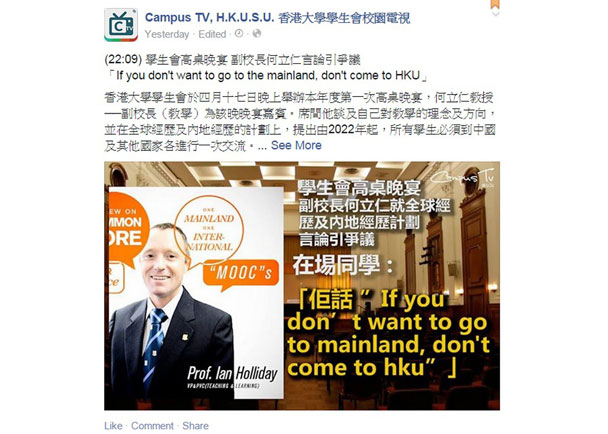
... When a student stated that he was
unwilling to engage in student exchange in mainland China, vice-president
Ian Holliday said: "If you don't want to go to the mainland, don't come to
HKU." This caused an immediate uproar.
(Hong
Kong University) HKU Vice-President Professor Ian Holliday meets
student representatives on matters related to widening students’ learning
experience April 20, 2015.
The following
was Vice-President and Pro-Vice-Chancellor (Teaching and Learning) Professor
Ian Holliday’s remarks made at the start of the meeting today (April 20)
with students from Hong Kong University Students' Union and other student
societies.
“I’d like to
begin by expressing my sincere thanks to HKUSU and other students from
across the campus for agreeing to meet with Albert (Dr Albert Chau, Dean of
Student Affairs) and me this afternoon to continue the conversation we had
at the High Table Dinner on Friday (April 17) evening. There are two key
points I wish to make upfront:
First, I
apologize unreservedly for my remark indicating that if students do not wish
to go to China they should not come to HKU. This was clumsy and misleading.
I now formally retract this statement.
My intention
was to say something much more positive. On the one hand, we believe our
students should be given opportunities to undertake a wide variety of
learning opportunities outside Hong Kong – we are strongly committed to
enhancing international student mobility. On the other, we recognize that
all students have choices, and we want the choices offered by HKU to be as
widely known and transparent as possible. Our overall aim is for students to
have a very clear sense of the learning pathways available to them here at
HKU.
Second, on
February 3, the University Senate endorsed an Academic Development Proposal
(ADP) for 2016-19. It had already been discussed and endorsed by all 10
Faculty Boards. Our ADP sets out an ambitious vision for the future defined
by three core commitments to internationalization, innovation, and impact.
Under the
internationalization pillar, HKU undertakes by 2022 to provide 100% of
undergraduate students with the opportunity to have both an overseas and a
China learning experience. This is an overarching aim to which the
University is committed. I’d like to stress that the focus is on opening up
a wealth of non-local learning experiences. Nothing in the ADP requires
students to undertake an exchange programme either overseas or in China.
Rather, we’re building a wide array of learning experiences: exchange, yes,
but also experiential learning, service learning, internships, research
attachments, and so on.
Driving this
commitment is our belief that to be globally competitive all of our students
should have the chance to develop a global mindset plus knowledge of China.
The 100% commitment is for the University to open up quality learning
opportunities overseas and in China for all of our undergraduate students.
The ADP does not state that these learning experiences are mandatory for
students. In working out the details of a concrete plan over the next 5-10
years, we are keen to work as closely as possible with students in all
Faculties and Departments.”
The students
of the University have benefited from a wide variety of overseas experience
over the years, gaining broader perspectives, new ideas, and heightened
sensitivity to different cultures. For examples, some students worked on
research projects in universities in the United States, led architectural
projects in our HKU’s Shanghai Study Centre, gained valuable experience as
engineering interns in Shenzhen’s industries, taught English in Mynmar’s
remote villages, built houses in rural Chile, and designed bridges and
kindergartens in remote villages in Mainland China. In addition to the
large-scale HKU Worldwide Scheme (which sends hundreds of students for
overseas exchanges), Faculties and Departments have already included
internships and learning experience outside Hong Kong as part of their
curricula, e.g. Chinese Medicine’s 1-year placement; Social Sciences "China
Study" field trip; Education language and cultural immersion programmes;
Earth Science field trips in Cyprus; and overseas field trips also for
BBA(IBGM), Geography students and students in other disciplines.
Therefore, the
idea is to extend the scope of this learning experience to cover all
students, to provide them with as much flexibility and alternative choices
to suit their academic need and interest. They can have classes,
internships, field trips, immersion or professional training programmes
etc., overseas and in China. HKU teachers will be involved in the
design/teaching/supervising of most of these programmes. The University will
continue to discuss with students on the design and arrangements of these
programmes and seek their views.
Internet comments:
- I think young people of Hong
Kong should never go to visit mainland China. They will be brainwashed the
second that they step across the border. Our young people must be kept pure and
uncontaminated. They must not be subjected to mental rape.
- Going to mainland China just once is worse than entering the Fukushima Daiichi
nuclear reactor?
- Recommended uniform for HKU
students on their once-in-a-lifetime compulsory visit to mainland China.
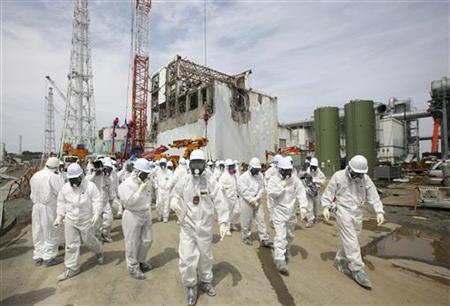
- Harvard University, Yale
University, Cambridge University, etc all have exchange programs with major
mainland Chinese universities. How come Hong Kong University can't do that?
- Ian Holliday wants to help the
HKU students learn more about mainland China. Right now, China is heading
towards becoming the top economic power in the world. If the HKU students want
to elevate their own competitiveness, they need to understand mainland Chinese
culture better. The exchange program is designed to achieve this. With mainland
experience, HKU students will be better equipped than others. Of course, the
students don't want to be competitive. When they grow up, they want to grow
organic vegetables in North East New Territories.
- Ian Holliday said: "If you don't
want to go to the mainland, don't come to HKU." If Ian Holliday doesn't want to
bend to the will of the students (as represented by HKU Student Union president
Billy Fung Jing-en who was elected by something like 20% of the students), he
shouldn't have come to HKU!
- It is high time that Holliday should go back to Great Britain for an extended
holiday!
- The students forced HKU Vice-chancellor Tsui Lap-chee out before, and they can force Ian
Holliday out now. All in the name of freedom and democracy, of course. Plus
freedom of academic research and institutional autonomy.
- Ian Holliday was not elected by one-student-one-vote. Therefore he must leave.
- Hong Kong University graduates
expect to say at their job interviews: "I don't have a return home card. I don't
intend to ever get one. I don't ever want to step foot on the mainland." When
the job is growing organic vegetables in North East New Territories, mainland
travel is not a requirement. But when the job is investment banking, you
probably need to travel to your Shanghai headquarters one or more times a week.
- A number of Hong Kong students
have their "Return Home
Cards" canceled, or are otherwise barred from entry into the mainland.
Because this is so unfair to them, the university must also bar their entire
student body from visiting the mainland in the interest of maintaining fairness
and equality.
- At this time, the promotion of
Professor Johannes MM Chan (former dean at the HKU Faculty of Law) to HKU
vice-president is being considered. Professor Chan cannot even travel to
Macau,
much less than mainland China. So how is he going to conduct any "exchange"?
- How come it is alright to be an
exchange student with any other country on earth (including North Korea), but making one visit to
mainland China is like pushing you in front of a firing squad?
- Young people in Hong Kong should
really go to mainland China. This way, they can see Hell On Earth in person.
Otherwise it will just be an urban legend.
- If you have never been in
mainland China, then anything critical that you say about China will be treated
as hearsay and bigotry. If you go there just once, then you are an expert on
China.
- Young people in Hong Kong should
study overseas. Attending university in Hong Kong is too restrictive due to the
proximity to mainland China. You need to go out and expand your vision.
- Study overseas? Can you afford it? Universities in Hong Kong are subsidized by
the taxpayers. Foreign universities charge extra tuition for overseas students.
- So what if you study overseas? When you come back to Hong Kong, you are most
likely still required to go to mainland China for work-related reasons.
Avoidance isn't going to solve the problem.
- You will learn nothing by going
to mainland China, except defecating/urinating in public. These HKU students are
better off going to Australia (or even North Korea or Iran) on exchange because it will be
more relevant for their futures.
- So you go to Australia as an
exchange student. You meet an Australian person.
"Hello, where are you from?"
"I'm from Hong Kong."
"Where is that?"
"It is next to mainland China."
"Is it a country in its own right?"
"No, not really. At least not yet."
"Then which country does it belong to now?"
"China."
"Oh, in other words, you are Chinese. I am really interested in China. Tell me
more."
"I don't know anything about China. I've never been there, and I don't ever want
to go there."
"Oh, I am sorry to hear that ..."
- Some students don't want to
visit the mainland, so they must be exempted from doing so.
Some students don't
want to pay back their student loans, so they must be exempted from doing so.
Some students don't want to take exams, so they must be exempted from doing so.
Some students don't want to pay for their purchases at 7-11, so they must be
exempted from doing so.
Some students don't like working, so they must be exempted from getting a job.
Some students don't like to pay rent, so they must be given free housing.
Some students don't like to pay for food, so they must be given free meals to
their liking.
- Whom would you rather work for
as an intern? Apple in Silicon Valley? Or Huawei in Shenzhen? The choice is
obvious. Everybody wants to work for Apple, the world's greatest brand.
- So you go to Apple, and they want you to devise a marketing plan for China.
But it turns out that you know absolutely nothing about the market structure or
customer behavior there and you are even resistant to wanting to know anything.
Do you have a future there?
- This is much ado about nothing.
The plan will not be implemented until 2022. According to Occupy Central founder
and Chinese University of Hong Kong Sociology Department professor Chan Kin-man,
the Chinese Communist government will have collapsed by then and the nation now
known as China will no longer exist. So the whole thing is just a fantasy, like
the Third Runway at the Hong Kong International Airport or the High Speed Rail
terminal in West Kowloon.
- (Passion
Times) HKU Campus TV conducted an online poll of 1,424 undergraduate
students (98% Hongkongers, 2% non-resident students). With respect to exchange
programs, 78.3% said that they don't want to go to mainland China. 96.7% said
that they want to go to foreign countries (that is, anything except mainland
China). Of the 33 mainland students, 25 said that they want to go to mainland
for exchange purposes. When asked whether the university administration can
mandate the destination of exchange programs, 96.84% opposed. 98.74% said that
the university administration should consult the students for their opinion
first. 99.3% said that the university administration has not given enough time
for consultation this time.
- What kind of online survey is this? Did the students get an email saying: "If
you want to oppose the mainland exchange program, then fill in this survey?"
- They don't want to go to mainland China to study. But they go there all the
time right now as parallel traders selling their iPhone 6's to the Huaqiangbei
(Shenzhen)
dealers.
- 劃地為牢,固步自封.
This refers to someone who draws a line on the ground to designate a
self-imposed prison. Or, the frog who builds a well to live in.
- (HKU)
During the 2013-2014 academic year, there were 15,560 undergraduate students
attending Hong Kong University. So this online poll has a response rate of 1,424
/ 15,570 = 9%. There is no indication that this is a random sample that
represents the full student body.
- This poll is almost as amusing as legislator Kenneth Leung's poll of his
Accountancy functional constituency. He contacted the entire community of voters
and got a 4% response rate. Then he said that because he contacted everybody, he
now has a fully representative sample of voter opinion. You have to question
whether he is a competent accountant because he knows nothing about audits
(which are just like surveys).
Q1. Do you agree to advance
constitutional reform in accordance to the Hong Kong Basic Law and the August
31st resolution of the National People's Congress Standing Committee?
62.25%: Agree
21.19%: Disagree
16.44%: No opinion
Q2. Should the Legislative Council
pass the constitutional reform so that there is one-person-one-vote for the 2017
Chief Executive election?
70.68%: Yes
15.19%: No
14.13%: No opinion
Q3. If the majority public opinion
wants to pass the constitutional reform, should the Legislative Councilors vote
accordingly?
71.27%: Yes
13.58%: No
15.15%: No opinion
Q4. Do you agree with the
opposition in boycotting the consultation rounds and tying down their votes even
before seeing the details of the proposed constitutional reform are even known?
18.96%: Yes
63.20%: No
17.84%: No opinion
Q5. If the opposition vetoes the
constitutional reform proposal, will you vote for them in the upcoming
Legislative Council and District Council elections?
22.47%: Yes
53.49%: No
19.91%: It depends
4.13%: No opinion
(The
Standard) Backing for package climbing, finds poll. April 20, 2015.
Support for
lawmakers to pass the political reform package that adheres to Beijing's
August 31 decision has been steadily rising, according to a survey by a
pro-establishment group. The New Territories Association of Societies
interviewed a total of 1,300 residents on three occasions between March 12
and April 17. Around 55 percent initially supported the package before the
number rose to 58 percent and then 61 percent. Backing for a chief executive
election that is in accordance with the Basic Law also rose from 66 percent
to 67 percent and then to 72 percent, the survey found. The association's
president, lawmaker Leung Che-cheung, said the trend shows people are more
realistic about reform.
(RTHK)
FTU survey says majority want reforms passed. April 19, 2015.
The pro-Beijing Federation of Trade Unions
says nearly 80 percent of the public want the government's reform package to
be passed by the Legislative Council. The group surveyed nearly more than
3,400 persons
of voting age, and also found that four out of five respondents opposed
filibustering tactics employed by pan-democrats in the council. Lawmaker
Alice Mak urged people to vote out legislators who don't act in their
interests, and says her party will help people to register as voters.
(Wen
Wi Po) April 21, 2015.
Hong Kong Island Federation of Associations
interviewed 3,045 citizens by telephone between April 2 and 15.
Q1. Should the Chief Executive election
follow the principles of the August 31 resolution of the National People's
Congress Standing Committee?
66.5%: Agree
26.5%: Disagree
5%: Neither agree nor disagree
2%: No opinion
Q2. Do you want to see one-person-one-vote
for the Chief Executive election?
90%: Yes
3%: No
5%: Neither agree nor disagree
2%: No opinion
Q3. If the majority of public opinion
favors passing the proposal, what should the Legislative Council do?
68%: Vote for
22%: Vote against
8%: Neutral
2%: No opinon
Q4. If the constitutional reform is not
passed so that there is no one-person-one-vote for the Chief Executive,
should those who vetoed the legislation be held responsible?
60%: Yes
28%: No
10%: Neutral
2%: No opinion
Q5. If the opposition parties veto the
legislation, when do you think the next chance will be?
43%: Not in the foreseeable future
30%: Within the next ten years
25%: Hard to say
2%: No opinion
(TIME)
Jimmy Lai. The 100 Most Influential People. By Common. April 16, 2015.
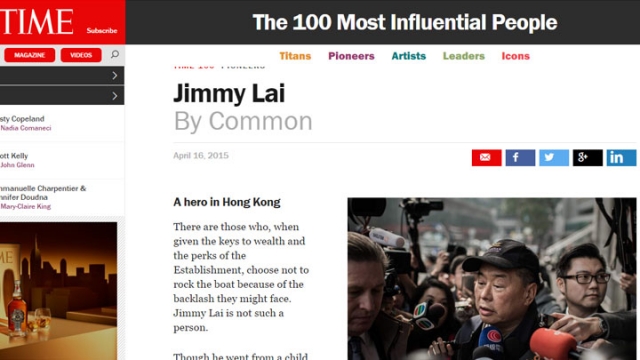
A hero in Hong Kong
There are those who, when given the keys to wealth and
the perks of the Establishment, choose not to rock the boat because of the
backlash they might face. Jimmy Lai is not such a person.
Though he went from a child laborer in a garment factory
to owning his own clothing line and media company, he rejected complacency
and the status quo when he chose to criticize a powerful government and
support a primarily student-led democracy movement in his beloved Hong
Kong.
His courage in the face of the firebombing of his home,
as well as his subsequent arrest for his role in challenging the ruling
order, resonates around the world as an inspiration for those seeking
self-determination. It was this kind of bravery that inspired me to
mention the Hong Kong protests in my Oscar acceptance speech, and that
reminds all of us to always strive to speak truth to power.
Internet comments:
- Stranger than fiction, indeed. First,
Fortune chose Joshua Wong as one of the world's greatest leaders. Now TIME
magazine has picked Jimmy Lai as one of the most influential people in the
world. The world of the late great western media is going batshit crazy,
but it is not reality-based.
- The TIME article is written by Common,
who "is a hip-hop artist and Academy Award
winner." With his qualifications, he is obviously an expert in Hong
Kong affairs (see
Glory). Therefore the rest of you Hongkongers should just STFU and
digest his pearls of wisdom.
- Is Common even aware that Jimmy Lai
and his entire family hold British passports?
- Doesn't Common know that the
firebombing was
most likely a staged act?
- Jimmy Lai managed to bring about
Occupy Central late last year. His American paymasters are very happy with
his wonderful work. So they have just handed him a dog biscuit in the form
of a TIME mention as reward. Good doggie! Sit! Jump!
- If the Localists have their way, the
new Hong Kong City-State will have no room for 'locusts' such as Jimmy
Lai. He was born in China, and that is an original sin that will
automatically disqualify him from City-State citizenship.
- If Jimmy Lai is so influential, then
why does his flagship newspaper Apple Daily have these paid circulation numbers
(source: Hong Kong Audit
Bureau of Circulations)?
July - December 2014: 162,824
January - June 2014: 182,731
July - December 2013: 188,534
January - June 2013: 210,961
July - December 2012: 223,116
January - June 2012: 243,890
July - December 2011: 251,246
January - June 2011: 279,990
July - December 2010: 285,675
January - June 2010: 294,569
July - December 2009: 297,474
January - June 2009: 306,124
And which newspapers are more
influential than Apple Daily? Try these verified free distribution
newspapers:
AM730, October - December 2014: 423,161
Headline Daily, October - December 2014: 848,861
Metro, October - December 2014: 382,665
Sky Post, October - December 2014: 498,675
Based upon these figures, isn't Charles
Ho (owner of Headline Daily) much more influential than Jimmy Lai?
Share prices for Next Media:
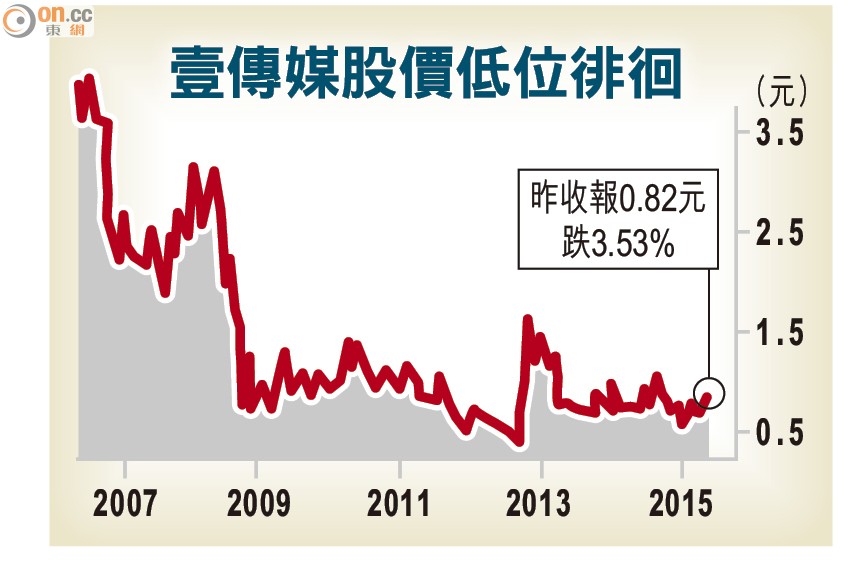
P.S. And as Jimmy Lai got more involved
in the "student-led democracy movement in his beloved Hong Kong," his
newspaper Apple Daily published more and more biased reports. As a result,
circulation kept falling. Today, Apple Daily is associated with the
saying, "If you believe in 10% of what is published in Apple Daily, both
of your eyes will go blind." At Internet forums, you see a post with an
eye-grabbing headline. You see the source is Apple Daily and you
immediately switch away. There is no point in wasting your time. Apple
Daily no longer employs reporters, they only have fiction writers on
staff.
- Thanks to Jimmy Lai's brilliant
management of Next Media (including Apple Daily/Next Magazine), a number
of employees will be laid off in an austerity move. Lai came up with the idea of giving
employees a 4% raise in salary while at the same time demanding each
department to reduce expenses by 5%. This will be accomplished by laying
off a number of employees while giving a raise to those who are retained.
The department has the discretion to decide who gets laid off and who gets
a raise. Localist self-determination and also easy as pie. But a number of
departments decided to freeze their own salaries and save some jobs. Since
they decided not to give themselves raises, they can't complain. The Next
Media Union asked senior management to share the pain with 10% salary
cuts, but there was no response. Now that's called brilliant leadership/management.
- Hong Kong libel laws lead to many
Internet users to use nicknames for the subjects. Thus, they will say
Direction News instead of Oriental Daily. For Apple Daily, the nickname is
"Poisoned Fruit" which reflects the poisonous nature of its biased
reporting. When such is your reputation, are you influential?
- Why is the Next Media group so
successful? In the latest court case (see
Oriental Daily), the magistrate describes the case file against
Next Media as being "as thick as a book." There were 128 court rulings
against Next Media (including Apple Daily, Next Magazine, Sudden Weekly,
Face, Sharp Daily, etc) for violating the <Obscene and Indecent Articles
Ordinance>. Unfortunately, the court has fined the group only between
$1,000 to $50,000 on each occasion when the maximum fine could be as much
as HK$ 800,000 plus one year in jail. Given the disparity between the
amounts fined and the potential profits, Next Media will obviously keep
rolling in filth. Next Media is also embroiled in a number of other court cases,
such as reporting Bawang shampoo as carcinogenic so as to cause a dive in
that company's stock prices; interviewing a double-murder suspect inside a
detention center so as to prejudice any later court trial (the judge
warned the jurors: "Don't read Apple Daily!"), etc.
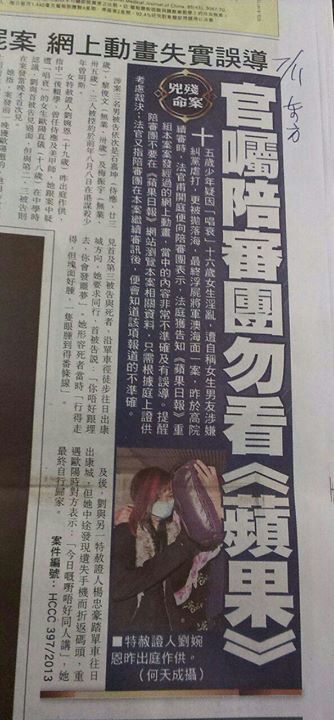
- Jimmy Lai has a lot of influence ... on the share
prices of his company Next Media.
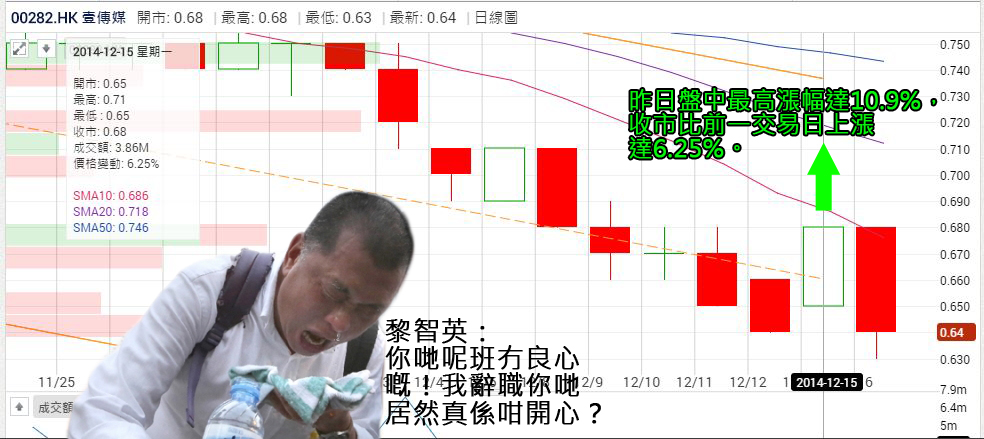
Share prices for Next Media had been dropping steady until December 15,
when Next Media announced that Jimmy Lai was resigning as Chairman/Chief
Executive Office. Shares soared by 10.9% immediately, because investors
finally saw hope.
- Jimmy Lai is indeed influential
because he has influenced many people (through his political donations).
Money talks. In the history of Hong Kong politics, nobody has given more
money to politicians than Jimmy Lai (HK $40 million in two years).
- At the end of day, there is still a
stack of Apple Daily still unsold. Oriental Daily/The Sun/Sing Tao are all
sold out. Sales figures don't lie.
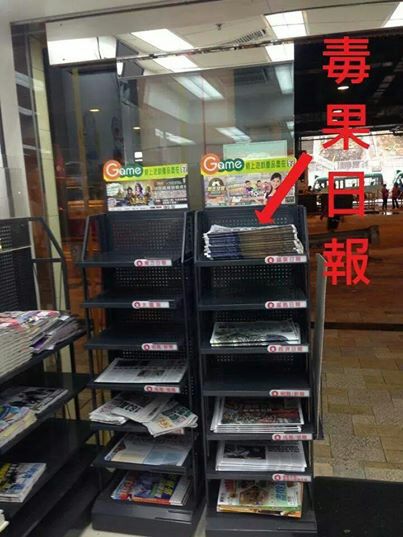
(SCMP)
What's the fuss about Jimmy Lai giving out political donations to Hong
Kong pan-democrats. July 23, 2014.
What's wrong with making massive donations to
political parties and anti-government groups? Nothing! So I am puzzled
by the media brouhaha over Apple Daily boss Jimmy Lai Chee-ying's
alleged donations worth more than HK$40 million to his pals in the
pan-democratic camp over a two-year period.
Readers of my column know I am no fan of Lai and Apple
Daily. But really, this united front effort looks so, hmm, amateurish.
According to leaked files, Lai donated over HK$40
million to pan-democratic parties and politicians in the past two years.
This included HK$10 million and HK$6 million to the Democratic Party and
Civic Party respectively, and HK$3.5 million to Anson Chan Fang On-sang's
group, Hong Kong 2020. Labour Party leader Lee Cheuk-yan and League of
Social Democrats chairman "Long Hair" Leung Kwok-hung received HK$1.5
million and HK$1 million respectively, while Occupy Central co-organiser
the Reverend Chu Yiu-ming was given HK$400,000.
So what? It sounds like Lai just keeps on giving to
the same people. Back in 2011, private files were similarly leaked
detailing Lai's multimillion dollar donations to pan-democratic figures,
including Catholic Cardinal Joseph Zen Ze-kiun.
The fact is that in Hong Kong, we have very loose
political donation laws which allow donors and recipients to avoid
disclosing who gives what to whom. I am sure if we had a tougher law, we
would find obscene amounts of donations from the who's who of the city's
tycoons to the Democratic Alliance for the Betterment and Progress of
Hong Kong and other pro-Beijing groups.
The Lai story, unfortunately, doesn't deliver the real
juice but only insinuates it - "foreign interference" through Lai to the
pan-democrats. The only evidence was that Lai gave US$75,000 as a
service fee to former US deputy defence secretary Paul Wolfowitz over
business ventures in Myanmar and that Lai was in e-mail communication
with former Democratic Progressive Party leader Shih Ming-teh in Taiwan.
Stop the presses, an e-mail exchange!
If I were Lai, I would be handing out donation cheques
on a soapbox in the middle of Victoria Park next time.
- (Oriental
Daily) This just in! Today, former Next Media chairman Jimmy Lai
and his wife had dinner with "Traitor Lee" Martin Lee, former Chief
Secretary Anson Chan and Civic Party chief Audrey Eu and her husband.
Afterwards, the party of five guests entered the chauffeur-driven car to
leave. It is illegal to carry six passengers in a car with a capacity of five. Of
course, the two senior barristers (Lee and Eu) wouldn't know anything
about abiding by the law.
(SCMP)
Hong Kong Federation of Students elects Nathan Law as secretary general. March
23, 2015.
Former Lingnan University student union
chief Nathan Law Kwun-chung was last night elected as the new secretary
general of the Hong Kong Federation of Students.
Law won with 37 votes from the 53 student
representatives from seven tertiary institutions qualified to vote in the
annual election. His only rival, Jason Szeto Tse-long, secured 14 votes. One
voter abstained and there was one invalid vote. Founded in 1958, many of the
federation’s leaders have been at the forefront of social movements. Some
have become politicians and others liberal academics.
Law, who studies Cultural Studies at
Lingnan University, was one of three student leaders at the heart of the
Occupy Central protests who were banned from flying to Beijing in an attempt
to press their demands for genuine universal suffrage in November last year.
(SCMP)
Hong Kong student federation may quit pro-democracy alliance ahead of Tiananmen
vigil. April 4, 2015.
The student body behind the Occupy movement
is split on whether it should join the annual vigil to commemorate the
Tiananmen crackdown and quit the pro-democracy alliance that organises it.
Nathan Law Kwun-chung, the new secretary
general of the Federation of Students, told the South China Morning Post
yesterday that his cabinet would make it a priority to decide whether it
should remain in the Hong Kong Alliance in Support of Patriotic Democratic
Movements of China, as the vigil was only two months away.
While Law did not have a strong view on
quitting the alliance, he said the new cabinet, formed by student-union
heads of seven universities, was "squarely divided" on the issue. "We don't
want to forget the June 4 crackdown, but there are views in the federation
that the candlelight vigil has been reduced to a ritual in recent years,
lacking a fighting spirit," Law said. "We want to remind people what the
students in 1989 were fighting for, their dreams." He added that some of his
colleagues had reservations about one of the alliance's slogans, "Build a
democratic China".
The alliance was formed in 1989 to support
the student pro-democracy movement in Beijing, which ended in a military
crackdown. It has since held a vigil in Victoria Park every year. Last year,
it said 180,000 people took part -the biggest crowd ever - while police put
the number at 99,500.
The federation is a founding member of the
alliance and its representatives have given speeches at past ceremonies. In
the past few years, some Hongkongers were unhappy with the alliance's
formality and staged ceremonies elsewhere. Law said the federation would
plan its own remembrance events as in the past. Last year, members
distributed copies of 1989 newspapers to train passengers as a reminder. The
57-year-old federation has re-emerged from Occupy as a major activist in
social movements. It is expected to continue to play a key role in the fight
for democracy.
Law, a third-year cultural studies student
and one of the few Occupy leaders remaining in the federation's new
leadership, said it was a hard choice to make in deciding to stay. "I was
tired after Occupy and I know this post will bring me a lot of pressure," he
said. "But I hope to contribute to the organisation with my experience and
help the new leaders develop a working relationship with the civil society."
Law's predecessor Alex Chow Yong-kang said
the sentiments against the alliance were understandable. "After Occupy,
people are angry with Beijing's tough grip on Hong Kong's political reform.
They feel lost about the city's relationship with China. It's hard for them
to chant the alliance's slogan," Chow said. While the city's democratic
future was tied to China, the alliance should review its role and
activities, he added.
...
Other issues on the federation’s agenda
include a campaign against the University Grants Council’s funding policy
that favours international over local research. Law said local research was
vital to developing ideologies for social movements and a group of public
intellectuals for the city.The federation will also draft a
“self-determination charter”, with students and professors, on their vision
for the city’s political, economic and cultural issues.
Law added that by “self-determination”, the
federation did not mean to advocate for an independent Hong Kong, but for
maintaining the city’s high degree of autonomy in those areas. “But the
federation is an open platform for students to express their views. If some
members want to discuss independence, we will allow them to do so. The
government may not like this but we will not be scared,” Law said.
(HKEJ)
The Federation of Students does not exclude the possibility of occupying the
Legislative Council. April 14, 2015.
Federation of Students secretary-general
Nathan Law said that the pan-democrats should not vote for the
constitutional reform proposal just because of some public opinion poll
results. Instead, they must resolutely reject any proposal based upon the
August 31 National People's Congress Standing Committee. If the
pan-democrats should make anti-democracy move, the reaction would be worse
than Occupy Central. He said that if the Legislative Council passes the
constitutional reform, the Federation of Students will not exclude the
possibility of occupying the Legislative Council building. Even if they
smash the glass doors and destroy public property inside the building, the
actions would be even more justified than those of Occupy Central.
On TVB yesterday, Nathan Law said that the
Federation of Students will definitely take action if the Legislative
Council passes the constitutional reform. The Federation will likely target
the Legislative Council. There are not plans so far and violent resistance
is not yet on the horizon. When asked to define violence, Nathan Law said
that charging into the Legislative Council and damaging the glass doors or
other public property do not constitute violence if nobody is hurt. "When
the citizens have reason to be angry at the Legislative Council, these
actions will be proper."
Nathan Law said that the pan-democrats
realize that there cannot be genuine universal suffrage under the August 31
National People's Congress Standing Committee framework. Passing the
constitutional reform is to abandon democratic principles and promises.
After Occupy Central, many participants were dissatisfied with the
Federation of Students and even the pan-democrats. Therefore, passing the
constitutional reform would trigger even more explosive situations than
Occupy Central.
(The
Standard) Student chief eyes 'break-in'. April 15, 2015.
The new Hong Kong
Federation of Students leader yesterday threatened to "break" the doors of
the Legislative Council if the political reform package is passed.
Secretary-general Nathan Law Kwun-chung said it would be "legitimate" and
non-violent if the action was taken.
On TVB's Straight Talk program, Law told
host Michael Chugani that the federation's Standing Committee has not
discussed what action to take in future.
"For me, the target will definitely be the
Legislative Council ... if there's any action later on if the proposal is
passed, maybe breaking into the Legislative Council, like you may have to
[break] ... some stuff like the glass in order to get into the Legislative
Council."Law said some radical groups who broke into Legco during last
year's Umbrella movement had "no legitimacy."
The Lingnan University student added: "The
stance of the federation is very clear that we want all democrats to veto
the proposal because we consider no possibility for genuine universal
suffrage from the framework by the NPCSC [National People's Congress
Standing Committee]. He also said it would give legitimacy to a falsely
elected chief executive in 2017, who may decide to legislate Article 23.
"If the next chief executive is elected by
a million people, he can say he is empowered by a million people. This
empowerment will grant him more legitimate reason to push for anything that
he wants to do," he said.
Law also said legislators who just listen
to public opinion polls when they vote for the reform should not be in Legco.
Opinion is divided over whether Hong Kong should pocket the reform proposal
first, polls show. Along with public opinion, legislators should "have their
own political judgment on such an issue that really affects the future of
Hong Kong," Law said.
He said he is "bothered" by the nickname
"Law37" after getting 37 out of 53 votes in the federation election last
month, in a take on Leung Chun-ying's 689 Election Committee votes.
Video:
https://www.youtube.com/watch?v=GJrWkyZVAcc (Speakout HK)
Video: RTHK
https://www.youtube.com/watch?v=k1hJdYZa4y0&feature=youtu.be
Internet comments:
- They gave the Chief Executive CY Leung
the nickname of '689', because he was elected by 689 electors in a
1,200-person election committee. This is a small circle election. Now Nathan
Law is elected by 37 out of 53 'student representatives.' This is a small
circle election. So Nathan Law will henceforth be known as "Law 37."
- We want 'genuine universal suffrage' for
the election of the Federation of Students secretary-general. Instead, we
get Nathan Law who had already been designated as the new incoming
secretary-general a long time ago before the election process ever got
started.
- The Federation of Students veterans
refuse to have universal suffrage of the secretary-general on the grounds
that it would make the winner more powerful than any student representative
from any one university. For the same reason, the pan-democrats don't want
one-person-one-vote for the Chief Executive because it would make the winner
more powerful than any legislative councilor from any one of five districts. And we
can't have that, can we?
- The Federation of Students veterans say
that the secretary-general does not have any decision-making power. Instead,
it is the Executive Committee composed of student representatives which
makes the decisions for the secretary-general to carry out. Furthermore, all
decisions have to be unanimous from the eight universities. If one or more
university dissents, the decision is tabled. I wonder if Nathan Law's
impromptu TVB comments (e.g. damaging public property inside the Legislative
Council) reflected the collective will of the student representatives who in
turn consulted with the student bodies in their respective universities?
Frankly I doubt it. This is just another small circle decision issued in the
name of all university students.
- Democracy at the Federation of Students?
Here is the simplest test -- go to the university campus plaza, intercept
some students and ask them to name the members of the Executive Committee of
the Federation of Students. There are eight of them. Let's see how many the
average student can name. Remember, these eight representatives are the ones
who make the unanimous decisions which will be carried out by the secretariat.
- (Wen
Wei Po) According to a study conducted by students at CUHK School of
Journalism and Communication, 74% of the students do not know how the
Federation of Students make their decisions and 67% do not know how their
representatives at the Federation of Students came about. With respect to
the December 1 siege of Government Headquarters, 47.3% became more negative
and 13.1% became positive towards the Federation. With respect to the
attempted Beijing visit by Federation members, 29.6% became more negative
and 24.5% more positive. With respect to the televised meeting with
government officials, 10.3% became more negative and 55% more positive. With
respect to their university withdrawing from the Federation, 20% supported
and 21% opposed while 51% were neutral.
- To this date, there are some diehards who
continue to insist that Occupy Central has been an overwhelming success.
Something about the Awakening of the Democratic Souls. Whatever. Well, the
true test has to be: Why does no one say "Let's Occupy Central again"
before/after the Legco vote? If it worked so well last time, it must work
again. Right?
- Occupy Central again? It will be summer
soon,
and just in time for a cool down from the simmering summer heat with the
newly acquired police water cannons. P.S. As long as nobody is killed, it is
not "police brutality" (following the logic of Nathan Law).
- I really want to see the water cannon in action. I am less interested in
whether the water cannon will cause any physical injuries. I am more
interested in seeing the water cannon soak and destroy the iPhone6's of the
demonstrators! Then they won't be able to take selfie photos and post to
Facebook. Quelle horreur! This is a worst fate than small pox.
- Nathan Law comes in the same mould as
Alex Chow in terms
of incoherence and incomprehensibility. Law said that following public
opinion polls to vote according to the preference of the majority of the
people would be against democratic principles. Say what? Elsewhere he says
that voting for one-person-one-vote is wrong because the pan-democrats know
that it is against democratic principles. Instead, we must veto the
legislation in order to make sure that the Chief Executive is elected by the
1,200-person election committee again. Say what?
- According to Nathan Law, democracy means
not following majority opinion as reflected by public opinion polls. Then
why does Albert Ho want to resign to trigger a de facto referendum
based upon the by-election? Or perhaps the whole point is to figure out what
the majority opinion is and then do the exact opposite in accordance with
Law's Principles of Democracy?
- Nathan Law said that if the Legco does
not vote according to his wishes (which he says are the wishes of the
People, who do not recollect ever empowering Law to represent them), then he
will lead the students to break into the Legco building and smash glass
doors and other public property. This is a threat, as in a triad gang member
showing up a restaurant saying: "You better pay me $10,000 in friendship
money or else I'll smash your glass window." (P.S. As long as nobody is
injured, it'll be okay.)
- In Hong Kong, triad gangsters never issue direct
threats because that would be breaking the law. Thus, they don't say "We'll
going to smash glass doors if you pass the law." They will only say, "We do
not exclude the possibility that glass doors may be smashed if the law is
passed." In like manner, the police do not say "We're are going to shoot any
rioters on sight." (Correction from a reader: The Royal Hong Kong
Police did say that in 1967 during the leftist riots.) But the police aren't even allowed to say, "We do not
exclude the possibility that rioters may be shot."
- If we have reasonable anger at the
Federation of Students, can we go to their offices, break through the glass
door and destroy their property? Would that be proper? P.S. Of course, this
is subject to the provision that nobody is hurt. If the Federation of
Students people try to stop us, we can defend ourselves in an appropriate
matter and if they get hurt as a result, it'll be their fault.
- After listening to Nathan Law on TVB, I am reasonably angry. Can anyone
tell me where he lives? I want to destroy some property.
- Let's start a betting pool on how many
people will join Nathan Law in the valiant charge into the Legco building.
On December 1 last year, the Federation of Students called for a siege of
Government Headquarters and the peak attendance was several thousand
participants (including many "civilian reporters"). This motley crew was
routed by 200 Special Tactic Unit ("Blue Smurfs") that night.
- Oh, wait, Alex Chow became forever linked with the saying: "叫人衝,自己鬆"
after the defeat on Lung Wo Road last December. That is, "he told others to
charge while he left the scene." Will Nathan Law be leading the charge
himself this time? Or will he continue in the grand tradition of sending orders via
mobile telephone in the name of "division of labor" ("some people
get bloodied while others take credit")?
- Why stop with Occupying the Legco
building? Why not go ahead directly to Occupy all of Hong Kong immediately?
Then when they grow up, the students will go and Occupy Beijing, then Occupy
China, then Occupy Earth, then Occupy the Milky Way ...
- How is Nathan Law going to Occupy Beijing when he doesn't own a
Return Home Card?
- I fully support the endless occupation of
the Legislative Council building by the Federation of Students. While the
Legislative Council is occupied, all legislators and their aides will be
suspended without pay. And then the government can finally get on with its
work without the never-ending filibustering.
- (Oriental
Daily) Let it not be said that the Federation of Students does not
do anything for the students. On this day, Federation of Students staged a
protest against the recommendation that students who defaulted on their
student loans should have that information passed along to credit rating
agencies, because a bad credit record may be detrimental to the financial
prospects of the said students. Instead, it is up to the government to
recognize the flaws of the education system which forced students to default
on their student loans and hence provide remedies (such as forgiving all
outstanding debts).
- (SCMP)
The Hong Kong government’s student loan scheme is open to exploitation, the
Ombudsman said, highlighting 13,000 default cases recorded over the past
three years involving HK$200 million in unpaid debts at its peak. The agency
loaned out HK$1 billion to HK$1.3 billion annually over the past three
years.
- On Facebook, the former CUHK representative Tommy Cheung Sau-yin to the
Federation of Students explained that 14% default rate ($200 million out of
$1.3 billion) is normal compared to the United States. Nothing to see here,
he says. This is wrong. According to
Breitbart, over 27% of student loans are in default. Therefore, Hong
Kong students need to work harder and default twice as hard in order to meet
international standards.
- Tommy Cheung also said that banks face higher default rates than
14% on their loans. Well, the guy doesn't even known the simplest economics. Let us say
that the default rate is 14%. The bank needs to make 4% to cover
administrative expenses (rent, salaries, etc) plus some profit. Therefore,
the bank needs to charge someone 18% in interest for a loan, or else it is
going to lose money. Right now, the typical bank loan interest rate is more
like 5%. If the average default rate is 14%, then the bank is losing an
average of 9% on loans. Why are the banks not bankrupt already?
- (Sky
Post) According to Cardiff Sixth Form College, they received 800
applications from Hongkongers this year compared to 250 last year. They only
have 50 spaces for Hongkongers, so that means each space will have 16
Hongkongers competing for it.
So this is one of the immediate consequences of Occupy Central. Parents are
sending their children overseas to study, less so because they are afraid
that their children will become radicals but more so because a graduate from
a Hong Kong university may have dimmer job prospects by association.
- This is so awful and selfish of Hongkongers to go and steal the resources
of the British people. I used to think that they are better than the
mainland locusts trying to steal the resources of the good people of Hong
Kong but
now I think they're all the same.
- (Passion
Times)
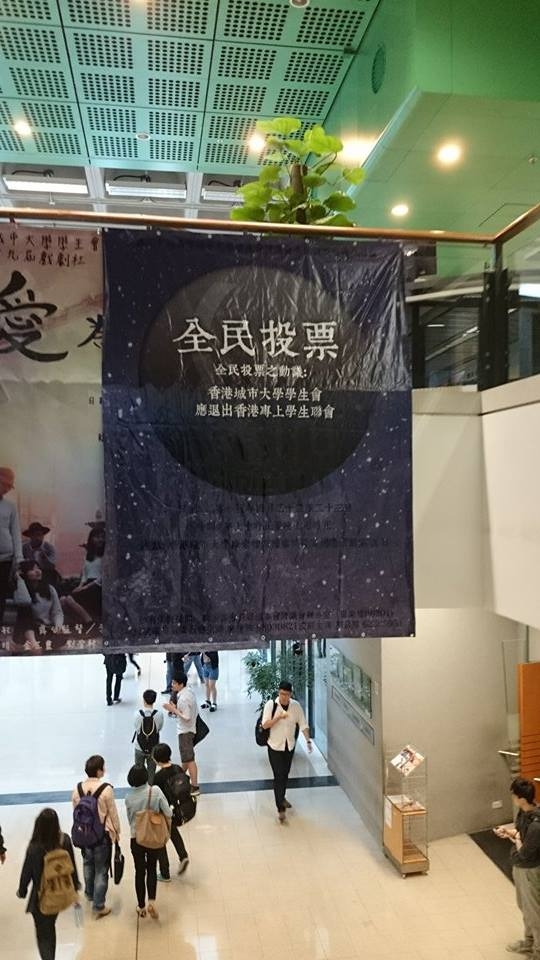
At City University, a referendum is being held to decide whether to withdraw
from the Federation of Students. So far, Hong Kong University students have
voted to do so while Baptist University students have voted to remain. The
photo shows the banner to call on students to vote. The white letters are:
Plebiscite: The City University Student Union should leave the Federation of
Students? The details (such as time and place) are provided in the text
below. Unfortunately, the details are black letters written on black
background! In other words, the election organizers have followed the letter
of the law by spelling out all the details except nobody can read a thing! What
kind of international standards are these to have black letters on black
background for election notices?
Also the voting takes places in a remote location that would require
considerable navigation to reach.
- (Oriental
Daily) At Polytechnic University, the referendum on whether to
withdraw from the Federation of Students was scheduled for yesterday. But
the Student Union delayed the voting until the end of the semester. Of the
seven voting days, five were scheduled to be self-study days during which
students stay home to study for exams. Therefore, there was practically no
voting. Nevertheless, there were 1,800 votes with the majority approving
withdrawal from the Federation of Students.
- (Latest news) The City University Student
Union president has just declared that due to the controversy over the
black-on-black banner, the referendum will be postponed until the next
academic year. Yet another glorious victory for freedom and democracy by the
City University students!!! NOT!!!
- (More late news) The City University
Student Union editorial committee issued a public statement today about
interference of editorial independence by the Student Union Executive
Committee. On April 17, there was an extra edition titled "President puts
the brakes on, referendum postponed indefinitely." The Executive Committee
told the editorial committee that this was misleading the public and
smearing themselves, and they demanded an explanation. A meeting was held,
but the Executive Committee was not satisfied. They said that their position
is "to oppose withdrawal" and "not to defend continual membership in the
Federation of Students." The editorial committee responded that everything
in the headline "President puts the brakes on, referendum postponed
indefinitely" was correct and factual. They said that they will defend
editorial independence and freedom of speech and press. They said that they
refuse to become the mouthpiece of the Executive Committee or otherwise
engage in self-censorship due to administrative pressure.
- You didn't think that Joshua Wong would
let Nathan Law get all the media attention, did you? This just came in ...
(Oriental
Daily) Scholarism convener Joshua Wong said that if any pan-democrat
legislator should switch votes and lead to the passage of the constitutional
reform, Scholarism will engage in resistance.
- Monkey see, monkey do.
- Not true. Joshua Wong also said that he supports Albert Ho's de facto
referendum, whereupon the huge voting will force the government to restart
the five-step constitutional reform process. Thus, Joshua Wong thinks
democracy means following public opinion whereas Nathan Law does not.
- Not true, not true, not true at all. It all depends on what the outcome of the referendum.
If nobody came out to vote even if it is positioned as a referendum, or if
the election is actually lost, then Joshua Wong and Nathan Law will both say
that they don't respect the outcome. If the referendum comes out with a
favorable outcome, both Wong and Law will support it. At present, both are hedging their bets their own way as if they differ in their positions
but they will share the same position in the end (namely, stop
constitutional reform no matter what).
-
https://www.youtube.com/watch?v=o5R23CZIx2o There is a long tradition in
Hong Kong of using a video clip of Anthony Hopkins' portrayal of Hitler with
sub-titles that tell another story. The latest one is about how even Adolf Hitler
couldn't stand the Federation of Students. Among other things, Hitler was
foaming in the mouth over: "An organization which does not have genuine
universal suffrage itself wants to fight for genuine universal suffrage.
This is a piece of sarcasm."
- (Wen
Wei Po) A street banner says: "Congratulations to Nathan Law for
winning the election at the Federation of Students with a tally of 37
votes." This street banner has shown up near Hong Kong University, Baptist
University and Lingnan University.
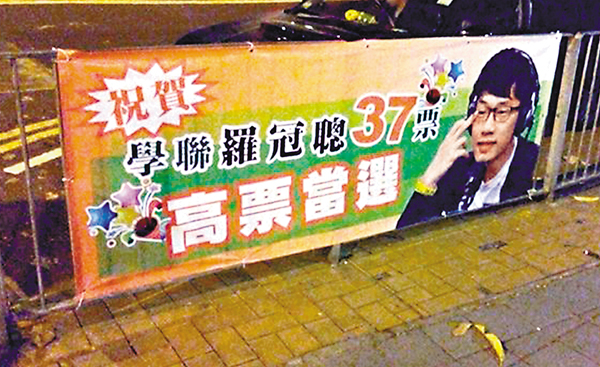
On Facebook, Nathan Law replied that he did not react negatively to these
scornful remarks. He said that those people responsible for these banners
are "fucking useless because nobody is afraid afterwards." As for the issue
over the number of votes, he said that "it is necessary to first contemplate
the power relationship between the Federation of Students and the individual
student unions" and "not purely heaping scorn based upon the number of votes
and turning this into a public relations issue."
(Sing
Tao) December 23, 2014.
After a policeman made an arrest
of a demonstrator, he and his 12-year-old daughter were quickly identified and
their information published on social media. The little girl received multiple "terrorist"
messages, including a 20-year-old man who issued an all-points bulletin with the
claim that "the triads have offered $600,000 to cut off one arm and one leg of
the policeman's daughter."
The Golden Forum user named Tong
had just turned 20 years old when he was arrested. His Internet name is "FUCK
wait for me to change my costume first." Early morning on October 18, the
police officer named Ng subdued a demonstrator along with a colleague. He
was said to have twisted the demonstrator's arm back. He was filmed by those
present, and his photo was posted on the Internet with the accusation of
torturing the arrestee. Because Ng's badge number was visible, Internet users
formed a human flesh search team.
Some Internet user posted Ng's
Facebook information onto the Internet, including his 12-year-old daughter who
is studying in Form 1, secondary school. The title of the post was "Ng XX has a lovely daughter"
and the post contained the personal details, photos and mobile phone number of
the girl. Many people left comments, including some that were provocative and
obscene. Ng's daughter also received many Whatsapp messages from identified
persons to assure her that she didn't have to be scared because the crimes of
the father should not be carried onto the rest of the family. But the daughter
was very scared and told her father about what was happening.
On the next day, Ng learned
someone has publicly issued an all-points bulleting at the Golden Forum:
"Roadside News Agency information: I learned that the triads have offered
$600,000 to cut off one arm and one leg of Ng XXX." Ng's photo was posted for
viewing: "This guy is cornered: He can leave town; or he can surrender himself;
or his daughter will be missing an arm and a leg." In order to avoid legal
liability, the post ended with: "The above is purely fictional." Ng and his
daughter were worried.
The police's Technology Crime
Division of the Commercial Crime Bureau got onto the case, and made the arrest
of 20-year-old Tong in Wanchai.
(Ming
Pao) October 23, 2014.
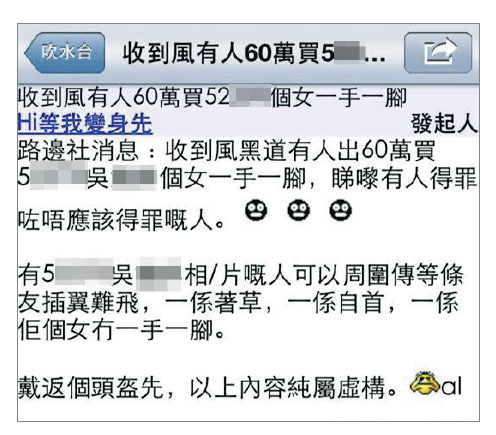
A 20-year-old who is studying
engineering at the Hong Kong University School of Professional and Continuing
Education recently made a post to the Hong Kong Golden Forum:
"Roadside News Agency information: I learned that the triads have offered
$600,000 to cut off one arm and one leg of Ng XXX. It seems that someone has
offended people who should not be offended. Those who have the photos/videos of
Ng XX should spread them around, so that he can't escape. He can leave town; or
he can surrender himself; or his daughter will be missing an arm and a leg. Let
me put on my helmet first: the above contents are purely fictional."
The police arrested 20-year-old
Tong X-leung in an apartment on Hennessey Road, Wanchai. They also removed one
desk computer, two laptop computers and one mobile phone. Tong was interrogated
through the night. According to information, Tong said that he made up the
information for fun. Further, he does not think he has committed any crime, and
he does not know Ng.
(Oriental
Daily) April 14, 2015.
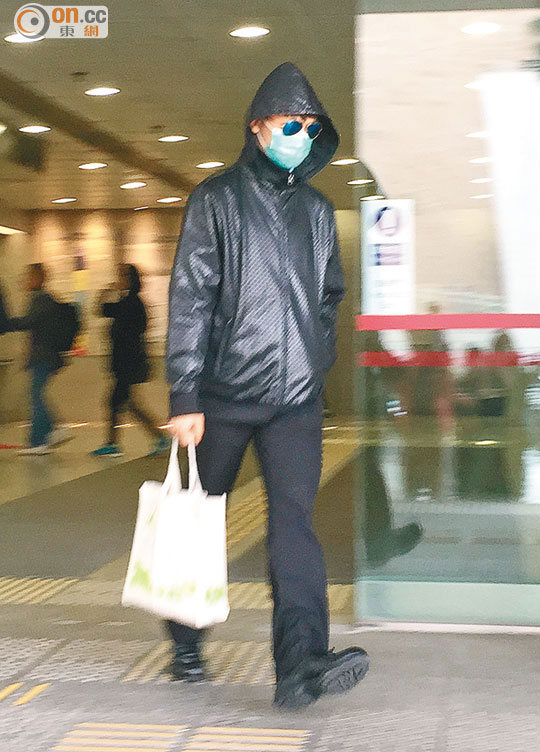
Yesterday in Eastern District
Court, the third-year HKU SPACE engineering student pled guilty to using a
computer with criminal intent. The magistrate sentenced him to 180 hours of
community service.
The defense lawyer pleaded that
the defendant was diagnosed with autism and language barrier when he was three
years old. At one point, he was not admitted by kindergartens. Therefore, the
defendant did not experience many social relations as he grew up, and did not
know how to communicate with others. Instead, he immersed himself into the world
of the Internet. During the Occupy Central period, he acquired dissatisfaction
with the police through the Internet. With no one to communicate with him, he
ended up doing something stupid. He is now rueful.
The defendant and his father both
apologized to the police officer who was the target. His parents also made Tong
see a psychologist/psychiatrist.
The magistrate said that an
efficient Hong Kong Police is the bedrock of stability and prosperity in Hong
Kong. Therefore, the court must protect police officers from threats and
physical attacks by citizens. As such, the actions of the defendant Tong
Wai-liang should lead to jail time. The magistrate took into consideration that
the psychological and mental problems were the main causes of the crime, so that
the defendant needs more psychological/psychiatric help than punishment.
Furthermore the case was a blessing in disguise because the parents are now more
aware of the problems of their son. Therefore, the magistrate decided to
sentence the defendant lightly to 180 hours of community service. The magistrate
encourages the defendant to stop being an otaku and to become more
involved with social activities and contacts.
Internet comments:
- The defendant's lawyer said that
his client experienced anxiety, sleeplessness and mild suicidal tendencies after
his arrest. Furthermore, he has pervasive developmental disorder such that he
was unable to come up with a single comprehensible sentence at 3 years old. The
psychiatrist said that his mental illness may be the cause of this crime.
This is jaw-dropping in two ways. Firstly, an expert witness testified with all
sorts of wild tales and speculations. Secondly, a magistrate actually bought into
this nonsense.
- I always knew this would happen.
All Yellow Ribbons are mentally impaired, because why would a normal person
sleep in the streets? Therefore, all Yellow Ribbons will eventually be released
by the courts due to
mental incapacity.
- The next time a triad gang
members gets arrested for extortion ("You better pay me $50,000 a month or else
I'll cut off one arm and one leg of your daughter"), the same defense can be
used. It worked here, and it should also work elsewhere. Just hire an expert
psychiatrist willing to make up a full clinical history for you.
- I listen to what the Umbrella
Revolutionaries say and most of the time they are incomprehensible (see, for
example, #101).
That is to say, they talk like 3-year-olds.
- At 3 years old, he was unable to
come up with a single comprehensible sentence. At 20 years old, he was able to
talk about offering $600,000 to cut off one arm and one leg of a
12-year-old girl.
- This defendant received a
sentence of 180 hours of community service. Meanwhile the Polytechnic University
female student who allegedly fornicated in public is facing a maximum of 7 years
in jail. Something is very wrong with this legal/judicial system.
- Oh, yeah, here is another case (Radio
881/903): 73-year-old used fake documents to procure a security guard
job seven years ago and earned total income of HK$540,000. He was sentenced to 4
months in jail. The magistrate said that he cannot consider the age or health of
the defendant in his sentencing, because a lenient sentence will encourage
80-year-olds/90-year-olds to do the same in the future.
Q1. Do you think that the
Legislative Council should follow the opinion of the majority of the citizens in
deciding whether to vote for one-person-one-vote for the 2017 Chief Executive
election?
84.9%: Yes
9.4%: No
5.7%: Don't know/ no opinion
Q2. If the 2017 Chief Executive
proposal is based on the August 31 framework set by the National People's
Congress Standing Committee, do you think that the Legislative Council should
(1) Pass the proposal so that there is one-person-one-vote for the 2017 Chief
Executive election; or (2) Veto the proposal so that the 2017 Chief Executive
election will be conducted according to the existing method?
60.9%: Pass
30.7%: Veto
8.3%: Don't know/no opinion
Q3. Some people think that we
should pass the 2017 Chief Executive election reform plan first so that citizens
can have one-person-one-vote, and then improve the method on a gradual basis. If
so, do you think the Legislative Council should pass this proposal? (Base: Those
who answered "Veto" in Q2.
5.0%: Pass
23.8%: Veto
1.5%: Don't know/no opinion
Q4. If the Legislative Council
fails to pass the 2017 Chief Executive election proposal, what are your views on
the prospects of having universal suffrage of Chief Executive after 2017?
28.7%: Optimistic
60.6%: Pessimistic
10.7%: Don't know/hard to say
(SCMP)
Shenzhen imposes once-a-week limit on cross-border visits to Hong Kong by
permanent residents. April 11, 2015.
Shenzhen's permanent residents are to be
limited to just one visit a week to Hong Kong using their multiple-entry
permits, a move that will slash the number of these visitors by about 30 per
cent, according to sources familiar with the arrangement. A Hong Kong
government source said the restriction would cut the number of visitors to
the city by 4.6 million a year.
Shenzhen municipal government issued the
ruling yesterday after a decision by the State Council to approve an
"adjustment" in the number of trips that multiple-entry permit holders can
make to Hong Kong, a notice circulating on the internet said. The notice set
out details of the arrangement - restricting the number of trips by
multiple-entry permit holders to one a week - although it did not say when
the change would be implemented. The trips cannot be saved up; they must be
used or they will be lost.
Shenzhen police and Hong Kong government
sources confirmed the new arrangement to the Sunday Morning Post.
The Hong Kong government said last night
that it had submitted a proposal to the central government to adjust the
multiple-entry policy. "Any adjustment to the policy is pending the central
government's announcement," it said in a statement. Only Shenzhen permanent
residents can hold multiple-entry permits, which allow them to make as many
trips as they want to Hong Kong. The Hong Kong government source said the
restriction on that category of visitors would cut the number of arrivals by
4.6 million a year, or 30 per cent, which would help crack down on parallel
traders, who buy products in Hong Kong to resell at a profit across the
border. About 14.9 million of the 60.8 million visitors to the city last
year were from Shenzhen, and held multiple-entry permits.
Brisk trading activities at border towns
and the large number of mainland visitors flooding in have become a source
of friction and triggered protests and clashes in the New Territories.
Mainland visitors are blamed for buying up daily essentials such as infant
formula and diapers, and putting pressure on public transport. But some
Shenzhen residents said they did not believe restricting the number of
visits would help resolve the problem of cross-border smugglers - 60 per
cent of whom are believed to be Hongkongers.
One white-collar worker in Shenzhen who
refused to give her name said: "I am disappointed with Hong Kong. The
shopping atmosphere is no longer friendly." She said she had not crossed the
border since the Lunar New Year holiday in February. And the boss of a
trading company said she hoped the restriction could be limited to twice a
week, as she frequently travelled to Hong Kong for business and to stock up
on baby formula.
Tourism sector lawmaker Yiu Si-wing said
the fact that no start date had been mentioned implied the policy may be
gradually introduced.
Meanwhile, North District Parallel Imports
Concern Group spokesman Leung Kam-shing doubted the move would be effective.
"Parallel-trading syndicates would just employ different people to do the
job," he said.
(Oriental
Daily) April 12, 2015.
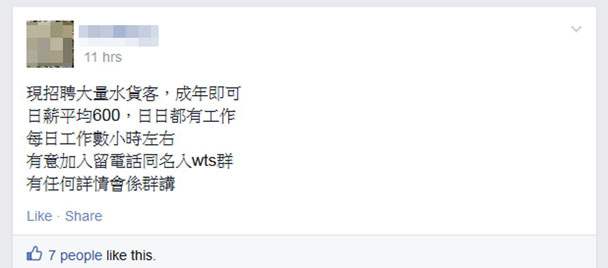
According to some analysis, if Shenzhen
permanent residents can no longer make several trips a day as parallel
traders, the slack will be taken up by more Hong Kong residents. According
to a Facebook group with a money bill as the profile photo:
"Now hiring large numbers of parallel traders, sole requirement: adults
Daily salary HK$600, can work every day
Only several hours of work per day
If you are interested, please leave your name and telephone number in the
Whatsapp group
Details will be provided in the group."
A large number of persons left their names
and telephone numbers. Most of these telephone numbers are Hong Kong ones,
but there were several mainland numbers (which could be Hongkongers having
mainland phone cards). So even before the policy is official in place, the
parallel traders are already on the move.
(The
Standard) $600 a day offered for HK carriers. April 13, 2015.
What appears to be a
man with an eye for a main chance claims to be recruiting Hong Kong residents
to work as cross- border carriers of parallel traders' goods for pay of HK$600
a day.
Kit Wong created a Facebook public group that
uses "recruitment bazaar" in its name to promise "fast money." Wong reckoned
to have about 20 likely recruits by 7.30 last night. He would need "numerous"
people for parallel trading, Wong said, and they would earn about HK$600 on
average. "You have to work every day for several hours at a time," he told
people. "Leave me your phone number and I will add you to the Whatsapp group
and details will be announced."
While most people professing an interest left
phone numbers as instructed, a Stefan Ho posted the message: "Wish your goods
will be confiscated and you guys all sent to jail."
A Hong Kong resident who said he is a veteran
of the parallel goods trading business - he claimed to have been in it for 10
years - said SAR traders will benefit under the new policy as mainlanders are
going to be so limited. The "transportation fee" for carrying parallel goods
must rise, he said. Some people had been scared by the anti-parallel goods
protests, he said, so the carrying `fee' was raised from HK$25 to HK$30. "But
it will increase to HK$60 gradually," he forecast. And for products such as
the iPhone 6, he said. The fee will go from HK$120 to HK$160 for each one.
Under cross-border trading mechanisms that
have worked until now, people carrying and dealing in daily goods have been
able to make about HK$10,000 per month. But products such as iPhones or iPads
can net from HK$20,000 to HK$30,000.
(Oriental
Daily) April 12, 2015.
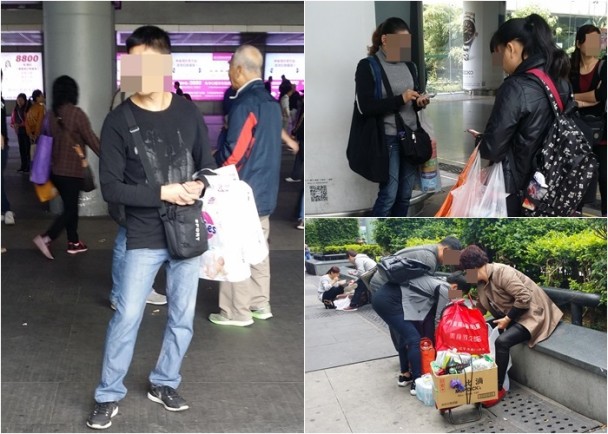
The news about the policy did not cause the
wages of parallel traders to rise. According to one female merchandise
receiver in Shenzhen, the prices for infant milk powder and cigarettes
remain the same as before. She believes the prices will not rise, because
her parallel traders are mostly Hongkongers. The reduction in mainland
parallel traders has little impact on her supply source.
According to a male merchandise receiver
named Brother Tao, the new policy will have zero impact on parallel traders.
Instead, it will affect the non-parallel trader visitors who go to Hong Kong
regularly for personal consumption. In the end, this will only hurt Hong
Kong's economy.
(Oriental
Daily) April 12, 2015.
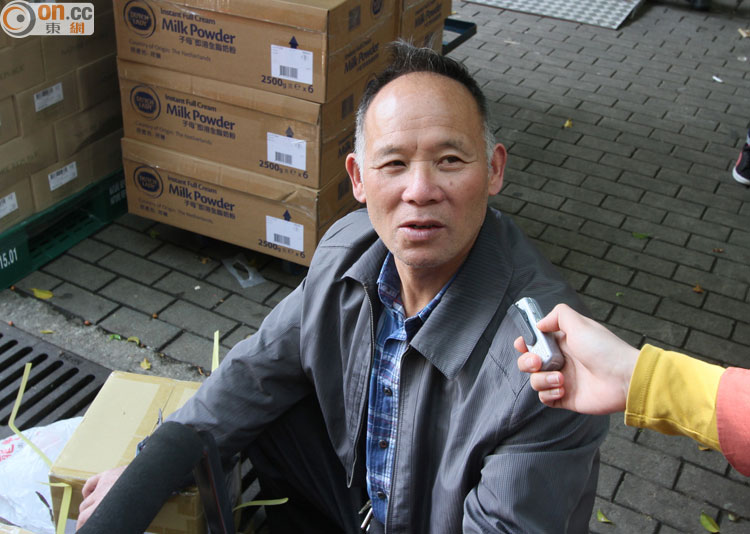
60-year-old Mr. Yang and his wife are
mainland parallel traders. They make one trip per day and carry mostly
infant milk formula, biscuits and cosmetic products. They make more than
HK$100 per trip. When the reporter told them about the new policy, they said
that they were unhappy but they would abide by their government's rules.
Meanwhile Hongkonger parallel trader Ms.
Cheng said that the new policy does not affect her at all. However, she
won't make a few more trips because there will be fewer mainland parallel
traders. At the present, she has a part-time job and lives in Kowloon.
Therefore, she is going to maintain her current workload.
(SCMP)
Decision to cut visits by Shenzhen residents 'won't end parallel trading'.
April 12, 2015.
Retailers and residents in districts
frequented by Shenzhen visitors are bracing for an expected cutback in
cross-border traffic, although some believe the move would only have a
limited impact on parallel-goods trading.
Yesterday, New People's Party vice-chairman
Michael Tien Puk-sun said sources in both the Hong Kong and mainland
governments had told him that the announcement to cap visits by Shenzhen
permanent residents to the city to one a week would be made today and take
effect immediately.
The current multiple-entry scheme was
introduced in April 2009, drawing 1.4 million visitors from April to
December that year. It rose to 4.1 million in 2010, and climbed to 14.9
million last year. The new policy could slash the number of these visitors
by as much as 30 per cent, or 4.6 million, per year.
But few people contacted yesterday said
they expected any new limit to eliminate the problems of parallel-goods
trading as there was high demand for daily staples such as milk powder,
which can be resold for profit across the border.
"Instead of hiring one person to conduct
the trade three times a day, they will probably hire three people to do it
once a day," said student Dicky Chung, a North District resident.
One employee at the Jun Hin Medicine
dispensary in Sheung Shui said the move would be another blow to the
pharmacy business after heavy lay-offs since the Lunar New Year. He said
that the change would likely be the "nail in the coffin" of many businesses
in the trade who would bear the "unnecessary" brunt of the new policy. He
added that it was possible that parallel trading ringleaders would simply
recruit Hongkongers to transport products. "We're talking about a HK$200
profit margin per day or about HK$5,000 to HK$6,000 a month," he said. "Who
wouldn't do it?"
Salesman Rain Lee of Fok Fai Jewellery in
Sha Tin said two-thirds of its business came from mainland visitors and the
new rule would hit them hard. "They will still buy gold as it is a store of
value. But overall we're already seeing fewer mainland tourists … because of
the tarnished reputation," Lee said.
Wholesale and retail sector lawmaker
Vincent Fang Kang said yesterday that the policy would "definitely affect"
the retail sector but the impact was difficult to estimate. Tien believed
the ceiling would help tackle parallel trading without harming tourism. "I
don't see how anyone would need to come to Hong Kong more than once a week
to buy jewellery and clothing," he said.
This was echoed by some mainland tourists
who spoke to the Post yesterday.
"I only come about once every two to three
months for shopping. I don't care," one visitor at Sha Tin's upscale New
Town Plaza said . She added that she was more concerned about the
possibility of being attacked by anti-parallel trading protesters.
Some residents had a different view. Jackie
Kwok, who has lived in Sha Tin for 30 years, welcomed the policy. "It will
have some effect in reducing the number of people in Sha Tin. Usually it's a
sea of suitcases here [at Sha Tin Centre]," Kwok said. "This area used to be
full of small shops selling fish balls and snacks. Now it's all pharmacies
and electronics stores."
But Sheung Shui resident MK Cheng
complained that even with fewer tourists, the district would never be the
same again. "Many who originally owned shops and family-run businesses have
leased them out instead as they can make more from rental payments. The
whole economy has changed fundamentally," she said.
(SCMP)
CY Leung issues parallel trading warning as new controls on Shenzhen
residents launched. April 13, 2015.
Chief Executive Leung Chun-ying issued a
strong warning against parallel traders in Hong Kong this morning, as Shenzhen
authorities formally announced a limit on cross-border trips by the city’s
residents in a bid to curb the number of parallel traders visiting Hong Kong.
Leung vowed that local and mainland Chinese
authorities would step up a crackdown on parallel trading, such as raiding
warehouses unlawfully used to store daily staples for the trade.
Speaking 45 minutes after Xinhua formally
announced that the multiple visit permit will be replaced by a new
one-visit-per-week permit, Leung also revealed that the new permit was
proposed by his government in June last year, but it took so long because
anti-parallel-trading protests had been “counter-productive”.
“It is now nearly a year since we put forward
the proposal, the reason why it [took] nearly a year … is partly because it is
a major move, secondly there is preparatory work to be done, but thirdly and
this is an important issue too, the unruly protest … increased the difficulty
in our discussion with the mainland authorities, and it hurt the feelings
between the people of Hong Kong and the mainland,” he said.
Leung reiterated that the commerce bureau and
tourism authorities will launch a series of promotional campaigns to spread
the message that the city still welcomes tourists from all places.
Leung’s remarks echoed that of a spokesman of
the State Council’s Hong Kong and Macau Affairs Office, who told Xinhua that
“the central government will continue to support the [Hong Kong] government’s
effort in developing tourism, and firmly oppose the behaviour of the small
minority of Hong Kong people, which hurt the feeling between the people of
[Hong Kong and the mainland]. The central government encourages closer
interaction between the people of the two places.”
The spokesman also added that “by improving
the multiple visit permit policy at an appropriate timing and in accordance to
the situation, it shows the central government’s concern about Hong Kong
people’s lives. It is also a measure to support the Hong Kong government’s
effort in actively responding to the people’s demand. It is beneficial for
more stable exchanges between the people in the two places.”
Xinhua reported at 9:02am that Shenzhen
residents’ will be issued one-visit-per-week permits starting from today, but,
as expected, the already-issued multiple visit permit is still valid.
A spokesman for the mainland public security
authority told Xinhua that the “multiple visit permit” pilot scheme was
launched at “the Hong Kong government’s request, and played an important role
in Hong Kong’s economic development, expanding employment and fostering the
people’s exchanges.”
The multiple visit permit was launched in
2009.
Without mentioning the parallel trading
problem, the spokesman added that “As there are more and more mainland
tourists going to Hong Kong, the pressure for mainland and Hong Kong border
facilities has increased, and the problems concerning the number of travellers
and Hong Kong’s capacity are becoming more apparent ... and the central
government made a decision to improve the tourism policy for Shenzhen
residents.”
Speaking after attending an RTHK radio
programme, New People’s Party vice-chairman Michael Tien Puk-sun expected the
new policy to cool down “anti-parallel trading” sentiment in Hong Kong.
But he also said that since the multiple
visit permits issued to Shenzhen residents will still be valid for up to a
year, it could take about six to nine months for Hong Kong people to “feel the
effect” of the new policy.
“Residents will feel the difference if
incoming travellers decrease by 4.5 million … but I also think that when the
sentiment is being cooled down, we should [ask] for more mainland cities to be
allowed to visit Hong Kong on the individual travellers scheme,” Tien
suggested.
Currently, residents of 49 mainland cities
can visit Hong Kong at least once a year without joining a tour group. From
2009 to yesterday, Shenzhen residents were the only group which could travel
to Hong Kong as many times as they like.
Speaking on an RTHK programme with Tien,
North District Parallel Imports Concern Group spokesman Ronald Leung Kam-shing
disagreed with the NPP lawmaker and said the Shenzhen residents’ “privilege”
should be scrapped altogether because it is unfair to other mainland
residents.
It is understood that the Hong Kong
government expects the new cap of 52 visits a year on the multiple-entry
permit to have limited impact on mainland visitors’ travelling pattern to the
city, as each permit holder crossed the border only 9.1 times on average last
year.
In a report released by the Bank of America
Merrill Lynch Global Research, the firm expected that the new policy will
result in a 2.3 per cent hit to Hong Kong retail sales growth this year, and
therefore it is slashing its retail sales forecast further to minus 5.8 per
cent year on year, from the original minus 3.5 per cent forecast.
But a spokesman also added that “We note that
the actual hit may be less, since these visitors can raise their spending per
visit to partly compensate for a lower number of visits.”
“Also … the potential drop may be offset by
stronger local domestic demand, as the wealth effect of recent stock market
rallies slowly gain traction in the economy,” he added.
Internet comments:
- (Passion
Times) According to Basic Law committee member Lau Nai-keung, even
if Shenzhen permanent residents are limited to one trip per week, parallel
trading will not disappear because the activity will be taken over by
Hongkongers. "Parallel trading will not cease. I am telling you. You
should not kid
yourselves. We have a tradition of parallel trading that goes back for more
than a century. The parallel trading genes are ingrained in the blood of the
people of Hong Kong. The genes are buried inside there." Lau also said that
equal treatment would mean that Hongkongers should be restricted to one trip
per week to mainland China.
- Many Hongkongers will be hurt if they too
are restricted to one trip per week. For example, I have a friend who is a
restaurant manager. For cost reasons, he rents an apartment in Shenzhen at
$3,000 per month. A comparable apartment in Hong Kong would cost more than
$12,000 per month. Every day, he commutes between Shenzhen and Hong Kong for
work. It is easy on the MTR. If he is restricted to one trip per week, he
will have to live in Hong Kong again. What can he rent at $3,000 per month?
A room partition with just enough room for a bed and no
toilet/shower/kitchen?
- This whole thing is dumber than a
dumbbell. On one hand, imposing limits on Shenzhen permanent residents means
that the slack will be taken over by Hongkonger parallel traders. Therefore
this will do nothing towards relieving the problems that groups like North
District Parallel Imports Concern Group are supposedly 'concerned' about. On the other
hand, the new policy would encourage the radical demonstrators that their
tactics were an overwhelming success because the Hong Kong/central
governments have yielded. Will they stop? No. Next step will be more
demonstrations to force one visit per month, then one visit per year, then
one trip per decade, then the ultimate goal of the central government
abandoning Hong Kong to independence.
- Those with unlimited annual permits will
be grandfathered. That is, if you apply next week, you will receive
the one-trip-per-week permit. But if you were approved last week for
unlimited visits over the next year, you can continue to do so. One year
later, when you apply for renewal, you will receive the one-trip-per-week
permit instead. So the transition will take one full year to complete. In
the meantime, the changes will be fairly gradual. In the absence of any
apparent developments, there will be more demonstrations.
- It is said that many workers in the
retail trade will be affected. Some will lose working hours, others will
lose their jobs altogether. What is there to fear, really? They can all go
to work as parallel traders! HK$600 per day for several hours of work each
day. That's $600 x 30 = $18,000 per month, better than the $10,000 per month
for a store sales clerk. And since these are Hongkongers, their pay will be
spent locally too. Therefore, the net effect will be a boost to the Hong
Kong economy.
P.S. Don't forget that parallel traders are paid in cash and therefore not
required to pay taxes. By contrast, sales clerks are paid on the books and
therefore reported to the Inland Revenue Department for taxation purposes.
Mandatory Provident Fund contributions are also withheld.
- In Hong Kong, a dishwasher makes $55 an
hour for 10 hours of work per day. That is only $550 per day. Why not work
several hours a day only for $600 a day? And no need to pay taxes. By the
way, you can also continue to accept your welfare payments.
- It is wrong to think that Hongkongers
will take over the parallel traders. At $600 per day, they make only $18,000
per month without any days off. There are plenty of jobs on demand in Hong
Kong paying a lot more. For example, I heard that a construction company was
offering $20,000 per day for a skilled bar-bender. The only reason why
people whine about low wages is that they lack the will and vision to
improve themselves.
- According to the estimates, that would
make 4.5 million fewer trips by Shenzhen permanent residents. If the average
expenditure per trip is $1,000, then the total is 4.5 million x $1,000 =
$4,500,000,000 or $4.5 billion. But the problem is that the publicity from
the demonstrators is impacting the confidence/desire of the traditional
mainland as well as overseas tourists. How do you reverse the image of Hong
Kong as the suitcase-kicking capital of the world?
- (Oriental
Daily) Hong Kong used to known as the Shopping Paradise and Gourmet
Heaven,. Recently Yahoo Travel interviewed 2,005 travels to rank the most
unfriendly cities in the world. The top ten most unfriendly cities in the
world are: New York; Los Angeles; Paris; Hong Kong; Sao Paulo; Tokyo; San
Francisco; London; Rome; Sydney.
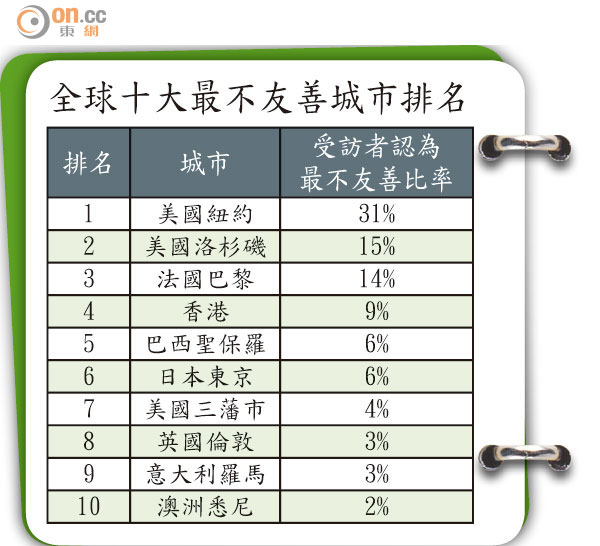
- Some people are celebrating the
Recovery/Reclamation of Sheung Shui/Tuen Mun/Yuen Long/Tai Po/Sha Tin. Well,
the work isn't done because parallel trading will continue to be done by
Hongkongers. The hard part is how to position the next series of
demonstrations. While the goal is clear (stop parallel trading), the targets
are less clear. Back then, it was easy to simplify things by demonizing the
parallel traders as mainlanders who tow luggage cases that roll over
toenails and who won't apologize. Now that the parallel traders are
Hongkongers, what do you say? These are Hongkongers indistinguishable from
other Hongkongers except they have luggage cases and handcarts. Should you
go out every week to one town and beat up all those with handcarts and
luggage cases?
- Various persons have praised the victory
achieved by the demonstrators, because:
- Fewer mainlander trips to Hong Kong
will take place (4.5 million a year, or 12,000 a day).
- Fewer mainlander purchases will be made, especially in restaurants,
pharmacies/dispensaries, cosmetic stores, grocery stores, discount stores
(such as PrizeMart), jewelry/watch stores, fashion stores, etc.
- I will be able to walk the streets more freely and the air will be
cleaner.
- Many of these establishments will go out of business because they won't
make enough to pay their rents.
- Many workers at these establishments will lose their jobs or have their
work hours cut down, but I am not one of them.
- With many vacant stores, rents will come down.
- Many landlords will lose a lot of money, but I am not one of them.
- With much lower commercial rents, the stores (such as used book stores)
that I like can come back into being.
- I am very very happy about all this.
- Restrictions on Hongkongers going to the mainland? I don't care either,
because I don't even have a Home Visit Permit.
- If commercial rents tumble, so too will housing prices. Then I will be
able to finally afford to buy an apartment.
This is the epitome of selfishness: I want
something to satisfy myself, I am happy that I am going to get it and I
don't care how many other people get hurt along the way. If people lose their
business or jobs, then they can eat cake. Of course, this is the feature of
Occupy Central/Umbrella Revolution.
- Let me back and think a bit about
fairness and equality.
(1) The anti-parallel trader demonstrators used violence to intimidate
outsiders. What if this happens to a Hongkonger traveling overseas?
(2) The anti-parallel trader demonstrators used violence to intimidate those
that think are mainland parallel traders. What about the Hongkonger parallel
traders? They account for more than half of all parallel traders. How come
nobody bothers them?
(3) Hongkongers travel to the mainland and elsewhere to enjoy the services
(massages, spas, baths), eat/drink and shop. They caused congestion all over
the world, but they expect to be welcomed. Conversely when foreigners from
all over the world come to Hong Kong, the Hongkongers welcome them. However,
when mainlanders come to Hong Kong, they are treated as locusts.
In thinking about these unfair and unequal treatments, I have to say that I
don't support these demonstrators.
- Apart from the Shenzhen multiple-visit
permits and the Individual Visit Scheme for residents in 49 Chinese cities,
mainlanders can also come to Hong Kong through a business visa making as
many trips as they like. The cost of the visa is more than RMB 10,000. But
if you divide this by 365 days, it is only around $30 per day. So this is
easily covered by the income for a parallel trader.
- The confusing part is about just who are
the undesirables and the desirables. There are different positions about
this, and anyone who wishes to enter the discussion should state their
positions first.
Position 1: The undesirables are
the mainland parallel traders. The reasons include: they clog up the
sidewalk when they pick up and pack their cargo; they take up sidewalk
space on their way to the train/bus station; they cause injuries to others
(such as rolling over toenails with their handcarts); they create long
waiting lines at the border crossings; they cause store rents to rise;
they led to many more pharmacies/dispensaries/grocery stores/cosmetic
stores than local residents need; they displace the traditional boutiques
and food stalls; etc.
Position 2: The undesirables are
the mainland visitors (parallel traders, tourists, business people). The
reasons include: they clog up the sidewalks; they cause waiting lines at
Chanel, Hermès, Ocean Park, Disneyland, Wong Tai Sin Temple, etc; they can't
speak Cantonese; they urinate/defecate/spit in public; they talk loud in
the MTR; they lead to many more jewelry/watch stores,
pharmacies/dispensaries, hotels, restaurants, tourist buses than local
residents need; they buy up the luxury apartments and cause housing price
to rise; they have the wrong political ideology; they don't want to
vindicate June 4th 1989; etc.
Position 3: The undesirables are
all persons the mainlanders who are not Hong Kong permanent residents
(parallel traders, tourists, business people, new immigrants). For the new
immigrants, their problem is that they can't speak Cantonese well, they
urinate/defecate/spit in public; they go on the public dole and steal
resources that belong to the people of Hong Kong; they multiply like
rabbits; they have the wrong political ideology; they think that they are
Chinese first, Hongkonger second (if at all); etc.
Position 4: The undesirables are
all the outsiders (from the mainland, Taiwan, Japan, South Korea, India,
Indonesia, Philippines, Singapore, Malaysia, Australia, New Zealand,
Canada, United States, South America, Africa, Europe, Middle East, Russia,
etc). The reasons include: they clog up the sidewalks; they cause waiting
lines at stores and restaurants; they don't speak Cantonese; they try to
be friendly by talking to you in English with funny accents; they lead to many more
jewelry/watch stores, clothing stores, hotels, restaurants, tourist buses
than local residents need; they never think that they are Hongkongers;
they are patronizing and condescending; they think that they are superior; etc.
Position 5: The undesirables are
all those who were not born in Hong Kong. The reason is that as long as
you were born locally, you are always suspected of being disloyal. That is
the same reason why the President of the United States has to be born an
American, and not an immigrant.
Position 6: The undesirables are
all those except the Valiant Warriors of the Hong Kong City-State and
their loyal supporters. All others are foreigners, mainlanders or Hong
Kong pigs.
- Some people say that the Valiant Warriors
of the Hong Kong City-State forced the Hong Kong SAR/Central governments to
make concessions. What? 100 or so demonstrators went on rampages to harass
citizens (women, children, senior citizens), and the governments yield? But
when 1.2 million demonstrators took part in the Umbrella Revolution, the governments
stood firm for 79 days before finally clearing the Occupy sites. This is
disproportionate.
- (BBC)
Shenzhen residents' reactions:
- It's alright if we can't go to Hong Kong.
But we demand the Shenzhen authorities to seriously curtail Hongkonger
parallel traders. We will not let our reputations be sullied while they
benefit.
- Hongkongers should also be limited to one
visit per week. They come over here and buy apartments, causing housing
prices here to soar. Why can't we have an opinion too?
- Friends, let us unite once more. Except
for reasons of work and study, we will not go to Hong Kong for shopping. We
will turn Hong Kong back to 2007. We the mainland citizens will not be
treated as second-class citizens.
- Let the Hongkongers go ahead. As more and
more tax-free zones open up, overseas travel become easier, Shanghai
Disneyland opens, who is going to Hong Kong to shop? With less employment
opportunities there, we will then restrict Hongkongers from coming to the
mainland to steal our resources.
- Hongkongers should be allowed only one
visit per year. Let the Hong Kong fools suffer!
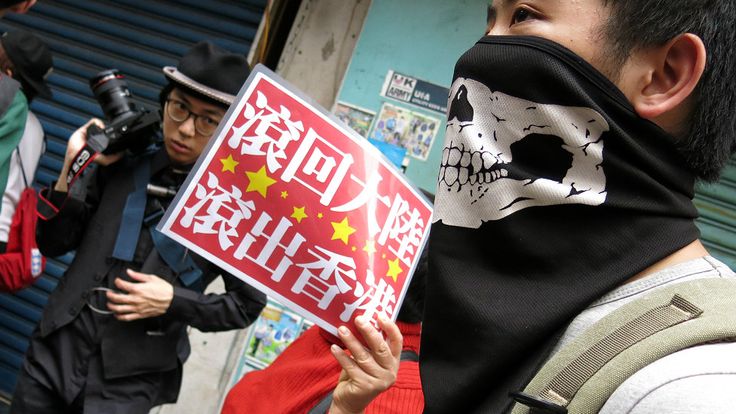
Hong Kong demonstrator holding sign: "Go back
to the mainland, get out of Hong Kong."
Flashback:
(Oriental
Daily) March 9, 2015.
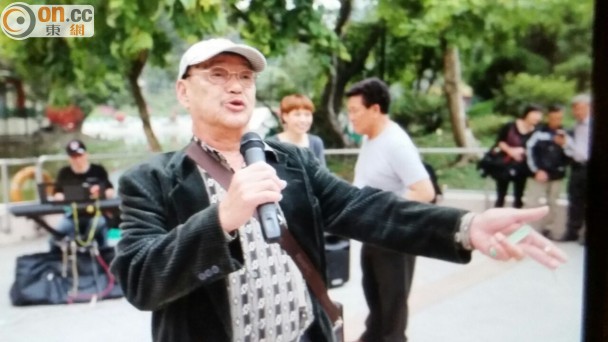
73-year-old Lee Wai-kuen passed by the demonstration site with a
handcart. He was surrounded and kicked to the ground by the young demonstrators.
Yesterday he was interviewed by our reporter in Tuen Mun City Park.
Lee said that he lives in Tuen Mun. He
spends several days a week playing music with fellow hobbyists in Tuen Mun City
Park. Last night, he encountered the demonstrators on his way home. "I had to go
past that section to go home. I don't know why they would kick me? What didn't
the police enforce the law?" He said that demonstrators demanded to know if he
was a parallel trader. He did not think that it was necessary to reply. He said
with reason: "They are not the police. They don't have the authority to
interrogate me."
Videos:
https://www.youtube.com/watch?v=Lu4gIlSoKsw (SocREC) Demonstrators harass
the 73-year-old man back from playing music in the park.
https://www.youtube.com/watch?v=d-u6qlYIfCA (Camman Wong) Assaults on the
bald-headed senior citizen and on the senior citizen park music player.
Fast forward:
(Oriental
Daily) April 10, 2015.
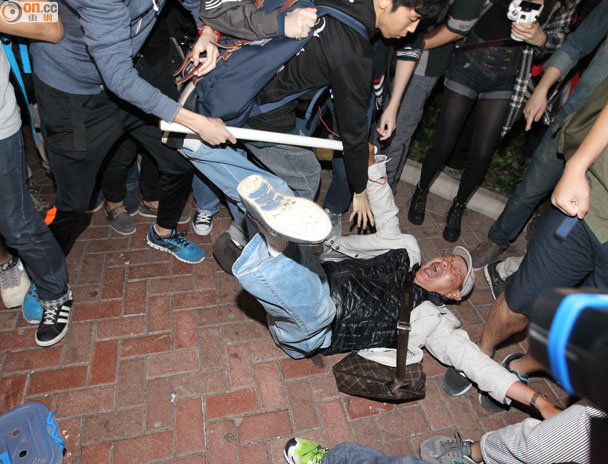
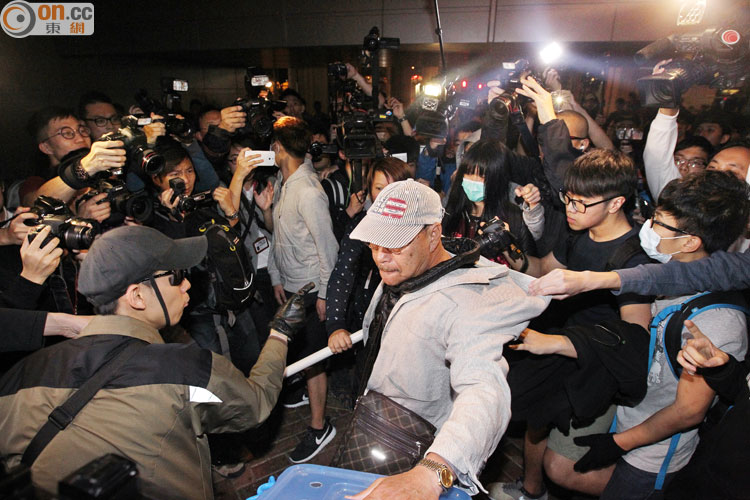
On March 8, 73-year-old Hong
Kong-born Tuen Mun resident Lee Wai-kuen was besieged and shoved to the ground
by demonstrators. To seek justice, Grandpa Kuen has filed a civil lawsuit in
small claim court against the masked demonstrators for $1 in damages.
Grandpa told our reporter that he
is obviously not doing this for the money. Rather, he felt that justice has not
been served from Occupy Central to the more recent anti-parallel trader
protests. Therefore, he is coming out to seek justice. "The $1 has only symbolic
significance. Ultimately I want the persons who pushed me down to the ground to
turn themselves in to the police and apologize to me. I am 70 something years
old. I have nothing left to fear."
"Who can you complain to about the
hurt feelings inside yourself?" Grandpa Kuen said that his audio-visual
equipment was damaged during the March 8th "riot." But more importantly, he lost
his dignity. So far the police has given him no updates since taking down his
statement that day. He fears that the perpetrators will go scot-free. Therefore
he is filing that lawsuit. "It has been one month since that incident. I am
afraid that the whole thing will just die off."
Grandpa Kuen was born, raised and
lived in Hong Kong. He plays the Chinese instrument erhu and the
saxophone. On recalled that on the evening of March 8, he had just finished
singing in Tuen Mun Park and was going home with his audio-visual equipment in a
handcart. He was mistaken as a parallel trader, surrounded and pushed around.
Grandpa Kuen condemned the demonstrators for disrupting law and order. He said,
"I have to go past that road to get home. I don't know why they kicked me."
Internet comments:
- Nice try, grandpa, but the
anti-parallel demonstrators don't have any money, not even $1. So you should
have spared yourself the trouble.
- Those demonstrators said that
justice was not served because the mainland parallel traders were disrupting the
lives of Tuen Mun residents. Therefore they took to the streets. They beat up a
73-year-old native Tuen Mun resident. If they did not know that they did wrong at the
time, they knew later from the news coverage. But none of them offered a word of
apology, never mind paying $1 in compensation. This is their idea of justice
being served.
- So simple and naive is this
Grandpa Kuen. If those guys were wearing surgical masks, they obviously have no
intention of turning themselves in to the police.
- Well, there was that guy in the brown jacket. He did not wear a surgical mask.
He wore a black cap and dark sunglasses (even though it was nighttime already).
- Grandpa Kuen won't get any
apologies. On Labor Day, the demonstrators are threatening to come back again.
If they spot Grandpa Kuen again, they will give administer another beating for
making them look bad in the press.
- What kind of lawsuit is this
when the plaintiff does not even know the names of the defendants? This is just
a publicity stunt.
- But we have the videos and we can run a 'human flesh search' on the
perpetrators, and then their names, home/work addresses, telephone numbers and
those of their relatives will be known to all. When all that is published,
Grandpa Kuen can decide to proceed with the named individuals for the lawsuit.
- Look at the video. Grandpa Kuen
was pushed to the ground by the demonstrators. Yes, he could not identify the
masked individuals who committed the act due to the lighting and confusion. But
does the inability to identify them or produce eyewitness imply that justice
will never be served? Look, robbers wear surgical masks when they rob banks, but
sometimes they get arrested and convicted. The difference is that the judges
have different standards required when the defendant is a pro-democracy
activist.
- The true criminals in the videos
are the photojournalists. A group of thugs is harassing an old man, and all
they see is a sensationalistic news report. They were just trying to move their cameras
into the best positions. They never thought about stopping the violence being a
civil duty.
- In defense of the demonstrators,
Wong Yeung-tat (Civic Passion) said that what he saw on the videos was that
Grandpa Kuen attacked the dozens of demonstrators with a stick. Therefore, the
demonstrators were forced to defend themselves against this aggressor in an appropriate manner. Whose
eyes do you trust? Yours or his?
- A different case is the one
today between Sheung Shui Rural Affairs Committee Hau Chi-keung and 85-year-old
Grandma Lau. (SCMP)
"The pair began to quarrel and Hau called police after accusing Lau of pointing
a finger in his face during their heated exchange. Police arrested Lau for
investigation last night." For the video, see
https://www.youtube.com/watch?v=aHqloHnqNyk at 0:30.
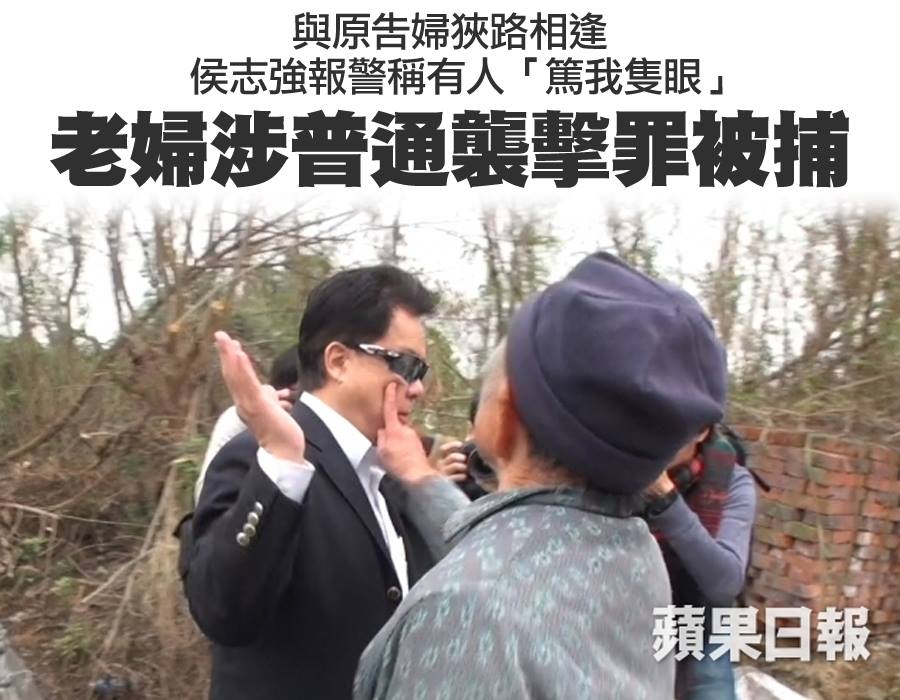
In this case, many people stood firmly behind Grandma Lau, who was said to be
bullied by Hau Chi-keung. They made fun of sunglass-wearing Hau's claim that
Grandma Lau poked his eyes with her finger. What do your eyes tell you?
More in
Occupy Central Part 1 (001-100)
Occupy Central Part 2 (101-200)
Occupy Central Part 3 (201-300)
Occupy Central Part
4 (301-400)
Occupy
Central Part 5 (401-500)
Occupy Central Part 6 (501-600)
Occupy Central Part 7 (601-700)
Occupy Central Part 8 (701-800)
Occupy Central Part 9 (801-)





























































































































































































































 \
\































































































































































































